
(Hong
Kong Free Press) December 10, 2015.
A rubbish bin at the demonstration area
outside the Legislative Council building was set on fire on Wednesday night,
causing a small explosion. The incident occurred after a planned rally
against the new copyright bill was cancelled. Two men are wanted by the
police. A burnt gas cannister was found near the rubbish bin after the
explosion. No one was injured when the incident occurred at around 8:30pm.
Mr Cheung, a witness, told local media that
he saw four to five people dressed in black clothing with face masks near
the site before the explosion happened. They pushed down a barricade in the
demonstration area, and left towards the MTR station shortly before it went
off. Firefighters arrived to investigate shortly after.
The police said that ôtwo men came close to
the bin, set fire to a substance and threw it in the bin. The bin then
caught fire and exploded. The two men then left through Tamar Park.ö They
said they believed the explosive device was a modified gas canister. Some
parts of the incident were captured by LegCo security cameras.
The two men seen fleeing the scene were
each 1.7-metre-tall and of slim build. One was wearing a mask and a dark-coloured
jacket, black trousers and a black backpack. The other also wore a mask, a
light-coloured jacket and dark-coloured trousers, the police added.
(SCMP)
December 10, 2015.
A police manhunt was under way on Thursday
for two suspects involved in an explosion last night outside the Legislative
Council building where a rally - which had been cancelled - was due to take
place against the controversial copyright bill. Two men in surgical masks
were seen igniting objects and hurling them into a rubbish bin in the
demonstration zone outside Legco in Admiralty at about 8.30pm yesterday,
police said. A fire ignited inside the bin, followed by an explosion. The
pair were seen fleeing towards Tamar Park, police said. ôWe believed the
explosive device was a modified gas canister,ö said Chief Inspector Chan
Chung-kuen of Hong Kong Island regional crime unit. ôSome of what had
happened was captured by Legco security cameras.ö
No one was reported injured in the case,
which was being called an act of arson. There was no damage aside from the
charred bin. A container of butane commonly used for mobile stoves was left
near the bin, along with a deformed plastic container of medical alcohol and
burned paper.
A witness at the site said he heard a noise
and saw about five men wearing black clothes fleeing before the explosion.
He said: ôThen I saw a rubbish bin on fire à there was a æbangÆ four or five
minutes later followed by a strong gas odour. The binÆs cover flew up about
30cm.ö
Another witness described a flame in the
bin followed by an explosion, causing the rubbish inside it to ôfly all
aroundö. He was among about a dozens protesters lingering within the area
despite the a rally against a proposed new copyright law earlier being
cancelled.
Shortly after the explosion, a
nine-second-long video clip showing the bin on fire and the explosion was
uploaded on YouTube by social media site TMHK.
Asked whether the video clip could help in
the police probe, Chan said he could no speculate about who might have been
involved as an investigation was ongoing.
The pair seen fleeing the scene were each
1.7-metre-tall and of slim build. One was said to be wearing a dark-coloured
jacket and a backpack, while the other wore a light-coloured jacket and
dark-coloured pants.
(SCMP)
December 16, 2015.
A group of
protesters suspected to be linked to last weekÆs blast outside the
Legislative Council building has been identified by police after poring over
security camera footage, the Post has learned.
This came ahead
of todayÆs rally against the controversial copyright bill as a radical
pan-democratic lawmaker has vowed to adjourn the bill, a move that Liberal
PartyÆs James Tien Pei-chun said the party would support.
The Federation
of Trade Unions, another pro-government party, said it would discuss what to
do today, fuelling uncertainty to the political showdown at LegcoÆs second
reading of the bill that has been dubbed ôInternet Article 23ö.
Force insiders
said initial investigations showed they belonged to a local radical group
who went online to call on people to take part in a rally against the second
reading of the copyright bill originally scheduled last Wednesday.
The meeting,
however, was adjourned as too few lawmakers were at the meeting and the
rally organised by concern group Keyboard Frontline was cancelled. The blast
happened at about 8.30pm. The second reading of the bill is expected to be
resumed today and the protest will take place from 4pm onwards.
The group that
had been identified called themselves ôblack blocö members because they
wore black clothing, sunglasses and face masks to conceal their identities,
one source with knowledge of the investigation said. A photo depicting an
image of ôblack blocö was posted by radical group Hong Kong Indigenous last
Tuesday ahead of the protest. The group called on supporters to follow
suit.
Police refused
to comment if the group identified was Hong Kong Indigenous. ôThey are
anti-government protesters. It seemed they wanted to cause a mess in Hong
Kong,ö said one source. It is understood the gang consisted of more than 10
locals. The source said police had identified some members of the gangs,
adding that ôarresting them is just a matter of time.ö
Videos:
(TMHK Truth Media Hong Kong)
https://www.youtube.com/watch?v=WQdjNEVcpaM
(TVB)
http://news.tvb.com/local/5669548b6db28ca55a000007/ News report.
According to eyewitness Mr. Cheung, "On the way over, I saw four or five men
dressed in black like robbers leaving. When I turned around, I saw a rubbish
bin on fire. About four to five minutes later, there was a loud bang and the
rubbish bin lid jumped up about 30mm into the air." The police said that the
surveillance video showed that "Two men got near the rubbish bin, set
something on fire and put it into the rubbish bin. Afterwards there was a fire
and then an explosion. The two men left in the direction of Tamar Park."
(DMHK)
https://www.youtube.com/watch?v=dEVk7BTTbOQ News report.
Internet comments:
- In 1995, Timothy McVeigh set
off a bomb outside the Alfred P. Murrah Federal Building in Oklahoma City and
killed 168 persons.
In 2015, the Hong Kong Black Bloc set off a bomb outside the Legislative
Council building and set a rubbish bin on fire.
- Portable gas cooker? Gas canister? Kerosene
bottle? Nobody has heard of
C4 or
TATP? This proves that the Hong Kong Independence Movement desperately needs to have a
Technology and Innovation Committee to lead its valiant warriors out of the stone age.
- Is this the single spark that will start a
prairie fire?
Will the people of Hong Kong respond by rising up now to overthrow the
dictatorship?
Is this how the Chinese Communist regime falls?
The answer to these and other similar questions is NO.
But there is a real possibility that more draconian security laws will be
introduced in the name of combating terrorism, thanks to news headlines such
as these.
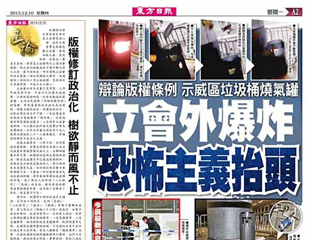
Oriental Daily front page
EXPLOSION OUTSIDE THE LEGISLATIVE COUNCIL
TERRORISM RAISING ITS HEAD
Debating the copyright bill
Demonstration area rubbish bin set on fire with gas canister
- And who would be happiest if Basic Law Article 23 on national security
is passed? The Chinese Communists. Therefore, this so-called rubbish bin
fire bomb must
be a false flag operation.
- The fire was set off at 830pm. At 130pm, the
Legislative Council meeting was adjourned due to a lack of quorum. Shortly
afterwards, Keyboard Frontline called off its 7pm gathering that was
scheduled to be held in the demonstration area of the Legislative Council in
anticipation of a vote. Since there shouldn't be anybody (not Legislative
Councilors, not demonstrators) around, the purpose cannot be to injure
anyone, although the bombers could have injured themselves if they are not
adroit with handling bombs.
- TMHK reported that some people did not
approve of Keyboard Frontline's unilateral decision to cancel the assembly
and they showed up anyway. This photo was taken at around 630pm. So there
were probably a dozen or so demonstrators.
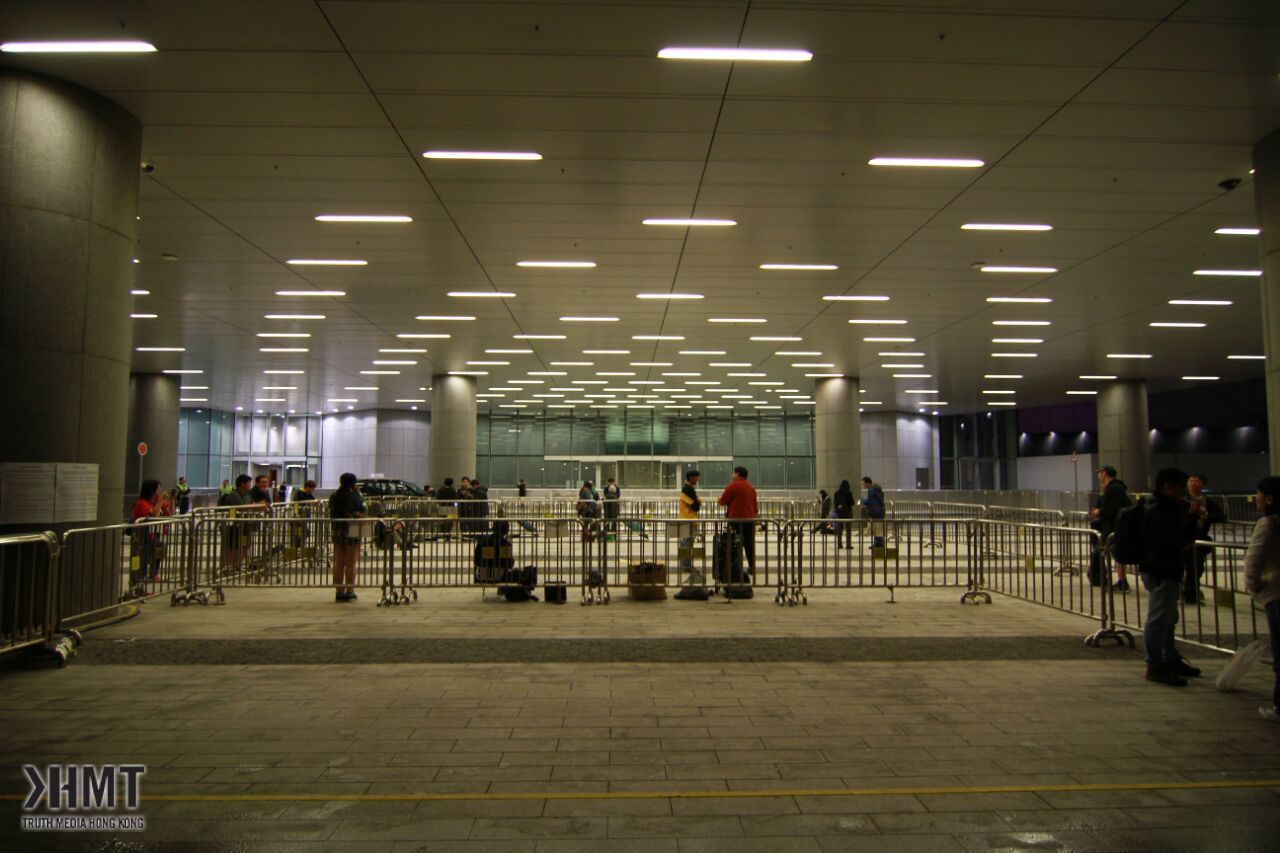
- Shortly afterwards, a video was uploaded
onto local media
TMHK. The accompanying news report says "At around 830pm, more than
a dozen demonstrators dressed in black suddenly toppled the metal barricades
in the Legco demonstration area and then dispersed quickly. Our reporter did
not observe any police officers stopping them or giving chase. Afterwards a
rubbish bin in the demonstration area caught fire and then exploded several
seconds later. So far nobody has been injured. The other dozen or so
demonstrators not wearing black at the scene also fled quickly from the
scene. There were only several reporters left in the demonstration area. Our
reporter spotted a gas canister, a kerosene bottle and some trash such as
paper container for beverages."
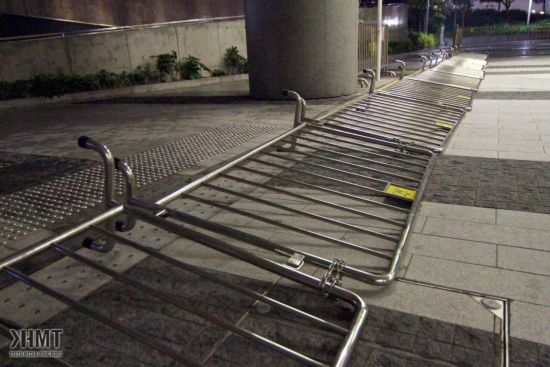
Later, TMHK added that their reporter heard
that the black-dressed demonstrators toppling the metal barricades, the
explosion of the rubbish bin in the demonstration area and the sounding of
the fire alarm in the Legislative Council building occurred at the same
time.
The above is contrary to
Wen Wei
Po's report, which says that the police saw on the surveillance
videos that the two masked men set off the fire alarm first to draw
attention and then went back to the demonstration area to set off the
firebomb.
- Whoever took the
video was part of the arson but did not take credit.
- I know who did it -- the
Symbionese Liberation Army! It encompasses all anti-capitalist,
anti-imperialist, anti-communist, anti-racist, atheist, feminist, pro-LGBT,
anti-American, anti-British, anti-Chinese,
anti-colonialism/anti-neo-colonialism movements coexisting in symbiosis.
- Men in black? They're imitating the Black
Bloc (Wikipedia):
A black bloc is a tactic for
protests and marches where individuals wear black clothing, scarves,
sunglasses, ski masks, motorcycle helmets with padding, or other
face-concealing and face-protecting items. The clothing is used to conceal
marchers' identities and hinder criminal prosecution, by making it difficult
to distinguish between participants. It is also used to protect their faces
and eyes from items such as pepper-spray which law enforcement often uses to
stun. The tactic allows the group to appear as one large unified mass, and
promotes solidarity.
United Kingdom: Black Bloc and
police clash
https://www.youtube.com/watch?v=-bArldeCM9E
Mexico: Black Bloc riots
https://www.youtube.com/watch?v=ZcZi6ZYjmVM
United States (Pittsburgh):
https://www.youtube.com/watch?v=F6qpYliAjXY
Cairo, Egypt:
https://www.youtube.com/watch?v=Fmt9h3XAxFc
- Hong Kong Indigenous Facebook
on Black Bloc
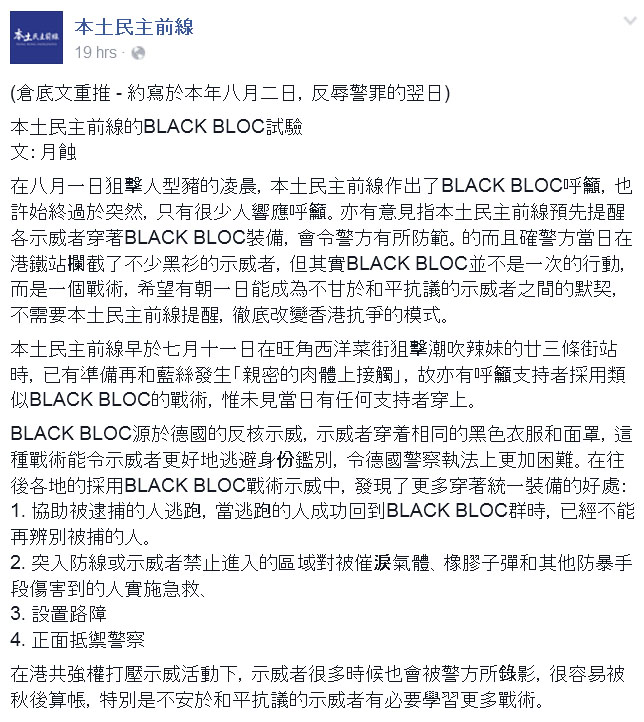
- (Wen
Wei Po)
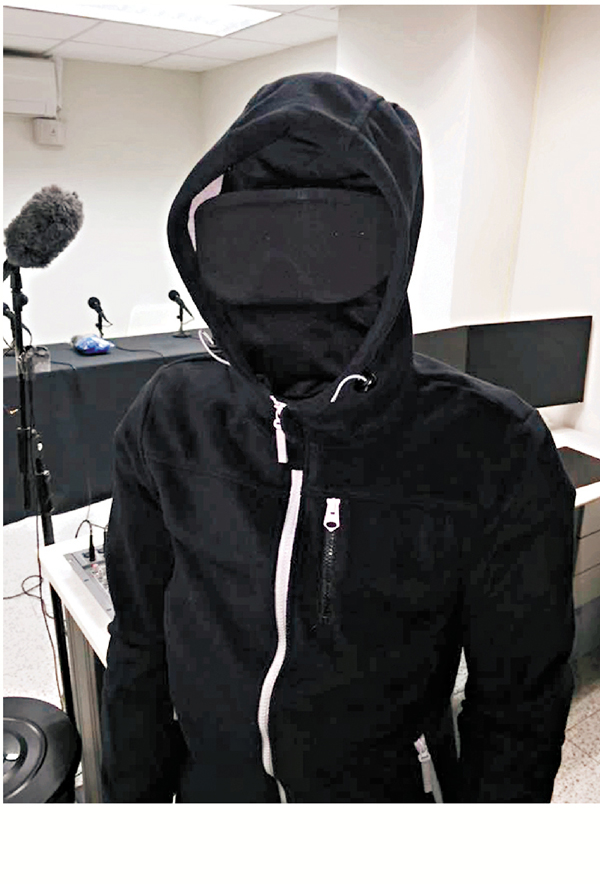
On Tuesday afternoon, Ray Wong (Hong Kong
Indigenous) posted a photo on Facebook. The model in the photo wore a zipup
hoodie with goggles, masks and black scarf. He wrote that this was an
illustration of the dress code for bicycling in the winter. "Inside the zipper
is a piece of normal clothing. Inside the normal clothing is the body armor.
The zipup is intended to be thrown away as soon as you finish bicycling so
that you can become a normal person again." He added: "It goes without say
about the clothes! You must have them! The helmet depends on your need. If you
want to ride in front, you should wear it because you may get hit by tree
branches. Those in the back need to think about what to do to clear the path
for the front row."
Meanwhile certain City-State supporters are telling each other on Facebook
about whether to get the "shark suits." "Group buying is possible," "30% off
on two pieces, 40% off on three pieces." According to one City-State cadre's
video titled "Going to BBQ on Wednesday," people should remember to bring
their "tools" and "changes of clothing." Furthermore, once they arrive, they
will not acknowledge any other persons so that they can't be arrested
together.
- Why should the police bother to arrest
anyone? The magistrate is just going to say that since the fire lasted less
than one minute and the defendants have no prior records for arson, all
defendants should be released immediately on one-year good behavior bonds.
- Legislator Raymond "Mad Dog" Yuk-man
predicted this a long time ago. (The
Standard)
During a Legco meeting yesterday, independent
member Raymond Wong Yuk-man said petrol bombs instead of eggs might be
thrown at officials in future, to protest against what he described as the
government's "fake consultation" on universal suffrage. Financial Secretary
John Tsang Chun-wah was hit on the head by an egg thrown by a protester last
Saturday, RTHK reports.
- Apple Daily reports that what the Keyboard Frontline
spokesperson said: "We believe that it was just a prank." So was Occupy Central, we
presume.
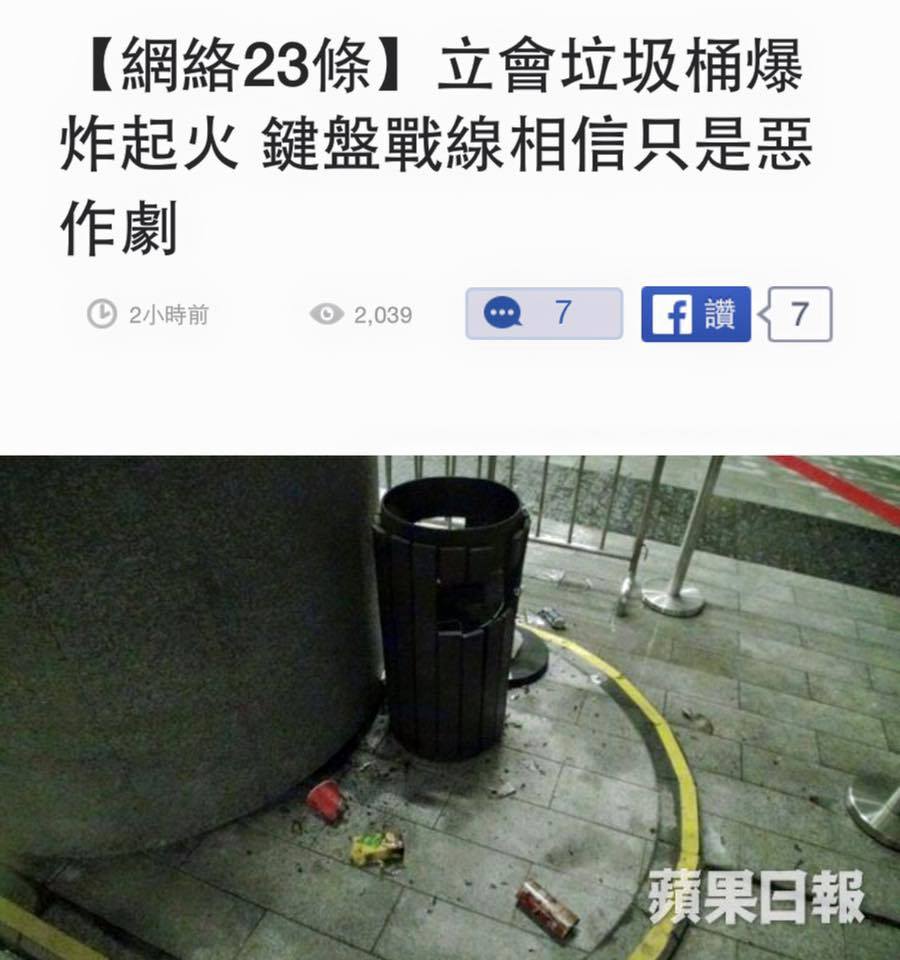
- Resistance Live Media
expels a
rat
fink.
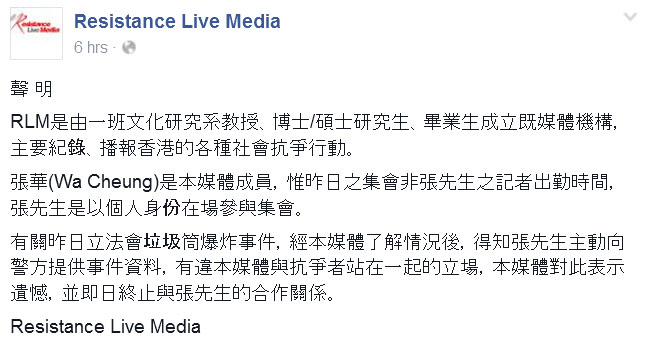
Resistance Live Media is a media organization formed by cultural studies
professors, PhD/Masters graduate students and alumni. They mainly record and
report on various resistance movements in Hong Kong.
Wa Cheung was a member of our media organization. At yesterday's assembly, Mr.
Cheung was not assigned to report. So Mr. Cheung attended the assembly in his
private capacity.
According to the incident of the exploded rubbish bin at the Legislative
Council, we learned that Mr. Cheung voluntarily provided information to the
police. This is against our position of standing on the same side as the
resisters. Our media organization regrets to state that we have terminated our
partnership with Mr. Cheung.
- The witness Mr. Cheung
appears in this DMHK news report
https://www.youtube.com/watch?v=dEVk7BTTbOQ at 0:40. Remember the face
of this rat fink!
- See also NOW TV
https://www.facebook.com/1640482902830291/videos/1672744826270765/
- The following is a
hypothetical statement from the Admiralty Rubbish Bin Exploders Squadron:
I know.
Everybody thinks that the Legco adjournment has bought us more time.
I know. At this time,
blowing up the rubbish bin has generated good and bad reviews, but it has no
practical consequences.
But I want to tell everybody that you must act
tough if you are fighting for something.
But I want to tell the
government that we won't fucking put up with more oppression!
We are not going to be
tortured.
We are not going to just talk anymore.
Neither are we people who are rash.
We have a plan, we have
courage, we have weapons.
And we dare to resist
you.
In other
words, this was just the stereotypical leftist retardism. Plenty of talk
beforehand, a tiny bit of action, plenty of talk afterwards, feeling good
about yourself but accomplishing absolutely nothing. You have seen them light
candles in Victoria Park for 26 years. And now you will see them blow up
rubbish bins until 2047.
- The police are looking for two men. Male #1 is
about 1.7 meters tall, thin-built, wearing a dark-colored hoodie, dark pants,
white sneakers, carrying a back pack and wearing surgical mask.
Male #2 is 1.7 meters tall, thin-built, wearing dark-colored hoodie,
light-colored pants, dark-colored sneakers and wearing surgical mask.
The two men with their backs to the camera are potential eyewitnesses.
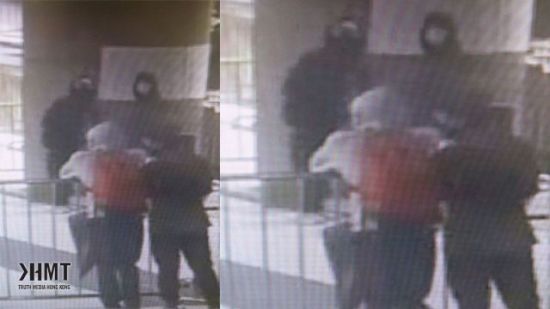
- For decades, the people
of Hong Kong have marched for their freedom, democracy and human rights to no
avail. They Occupied Central for 79 days but the government ignored their
demands. Finally, two courageous men have come out to toss the first petrol
bomb in order to blaze the trail.
But how did the people
respond? As you expect, they said that the government staged this incident.
Earlier when someone broke the glass windows of the Legislative Council
building (#055 and
#57), people said
that the vandals must be police agents provocateurs. Next in the case of the
Sai Kung bomb factory (#274),
people said that the government must have stage-managed the whole project. Now
in the case of the great rubbish bin explosion, they said that the police must
be using a false flag operation to discredit those who oppose Internet Article
23. When the first blow of the revolution has just been struck, we should be
cheering and joining in. Instead it is being ridiculed as impractical and
pointless.
This reminds me of the UFO's. There was a time
that whenever new UFO videos come out, people vied with each other to point out how fake
the latest videos were. For a time, everybody thinks UFO's are conspiracies
spun out by government for inscrutable reasons. Today, things are different.
We now know that UFO's are quite real.
In like manner, people
may cry false flag operation or conspiracy theory at that first petrol bomb.
But when the second, the third ... explode, there will come a time when the
world will accept that the people of Hong Kong are on an irreversible,
irrepressible and irresistible revolutionary course to gain their freedom,
democracy, human rights and genuine universal suffrage.
- So they blew up a trash
bin. What message did the citizens get? Why, oh why was this done? And why is
someone calling them the Glory of Hong Kong?
- They chose to blow up a trash bin because it is even less able to defend
itself than grandpas and little girls. For they are not called the valiant
warriors for nothing.
- Some day, the guy is going to jail and his cellmate asked: "What are you in
jail for?" Answer: "I blew up a trash bin." Is this supposed to be funny or
tragic?
(EJ
Insight) December 9, 2015.
Hong
Kong police still hold the worst public image among all of the cityÆs
disciplinary forces, according to a recent poll, although another survey
commissioned by the police department itself suggests high public
satisfaction. The satisfaction rate of Hongkongers towards the police stood
at 53 percent, according to a semi-annual poll by the Public Opinion Program
(POP) of the University of Hong Kong, up 3 points from a similar poll six
months ago, Ming Pao Daily reported on Wednesday.
ThatÆs
still the worst, compared with 89 percent for the Fire Services Department,
the highest rating among all disciplinary forces, and 73 percent for the
Auxiliary Medical Service, which saw its rate fall 9 points from the
previous poll.
(HKU
POP) 1,039 persons were interviewed by telephone November 23-30, 2015.
Department of HK Fire
Services
89% satisfied
2% dissatisfied
Government Flying Service
73% satisfied
1% dissatisfied
Auxiliary Medical Service
73% satisfied
2% dissatisfied
HK
Customs and Excise Department
79% satisfied
3% dissatisfied
HK
Immigration Department
76% satisfied
4% dissatisfied
HK
Correctional Services
58% satisfied
3% dissatisfied
HK
Police Force
53% satisfied
24% dissatisfied
Internet comments:
- Since we are talking
about "universal values" and "international standards", let us see what
is happening in the United States of America.
Background information: According to the
Wikipedia, the number of killings by law enforcement officers in the
United States were:
367 in 2015 (incomplete)
625 in 2014
337 in 2013
602 in 2012
166 in 2011
287 in 2010
(Gallup)
Confidence in US Institutions in 2015:
72% The military
67% Small business
52% The police
42% The church or organized religion
37% The medical system
33% The presidency
32% The US Supreme Court
31% The public schools
28% Banks
24% Organized labor
24% Newspapers
21% Television news
21% Big business
8% Congress
In Yvonne Leung's beloved
separation of powers, the legislative, executive and judicial branches have
the confidence of 8%, 33% and 32% of the people respectively, compared to 52% for the
police.
Hong Kong is no
surprise either. Here is the performance of members of the Legislative
Council according to
HKU-POP. This is 2011 data, as HKU-POP no longer polls on this
issue. If there are up-to-date figures, they will be a lot worse after
Occupy Central.
16.9% positive
28.0% half-half
48.7% negative
- A significant proportion of
the population has little or no contact with the listed government services
(e.g. Government Flying Service?). They are most likely to have come across
or know about
the police and fire services. Therefore a lot of their impressions comes
from media coverage.
The HKU-POP covered the
People's Liberation Army Hong Kong Garrison
49% satisfied
10% dissatisfied
The PLA Garrison is confined
to barracks and there is little media coverage about them (except for Open
Day on October 1st). Practically no Hongkonger will
have come across PLA Garrison members. So what is there to be
satisfied/dissatisfied about?
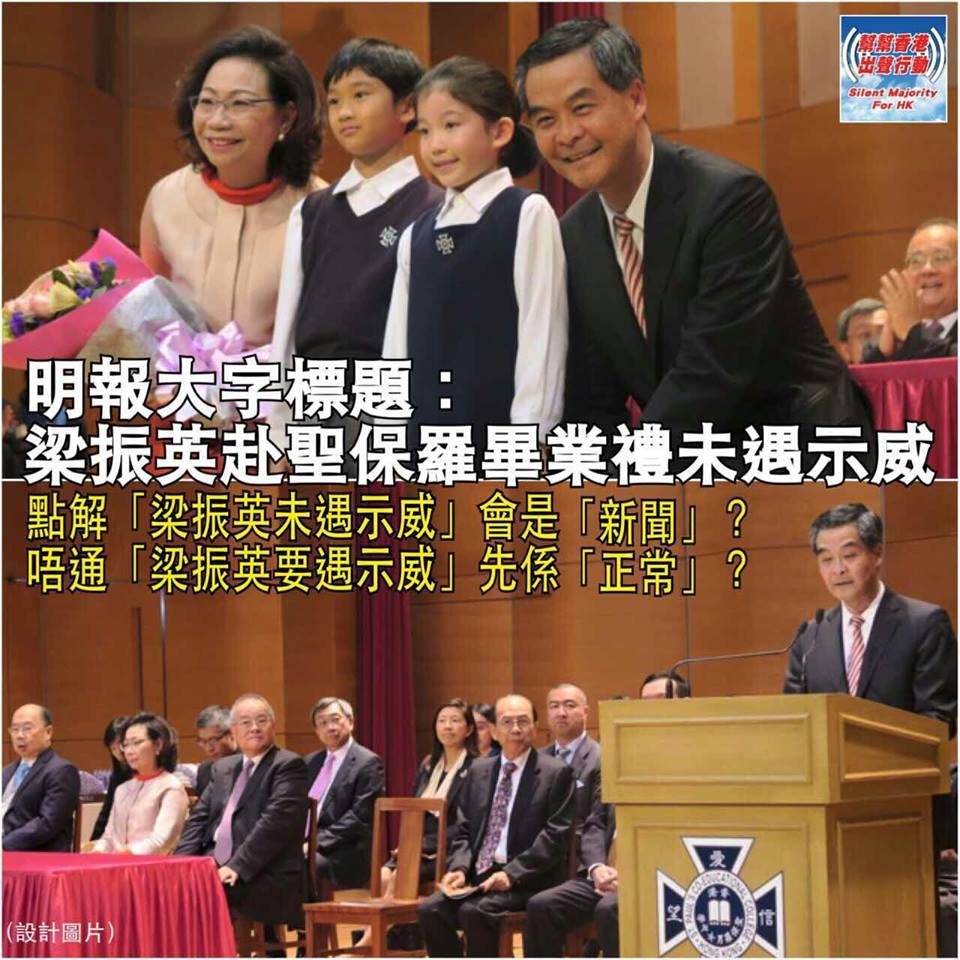
Huge Ming Pao headline: CY Leung
attends St Paul graduation ceremony and does not encounter demonstrators.
Internet comments:
- Wow! I can easily become a
Ming Pao headline writer. Here are some current news stories and my
headlines:
Donald Trump gives speech and
does not say that all Muslims should be incarcerated in concentration camps
Police shoot unarmed black teenager and
black communities everywhere do not erupt in riots
Beijing issues red alert smog alert and the
2022 Beijing Winter Olympics are not canceled
Mount Etna erupts again and does not bury
Pompeii in ashes
- Ming Pao writes this
type of headline because they believe or they want us to believe that the
Chief Executive CY Leung is so immensely unpopular that he encounters numerous
demonstrators everywhere that he goes. Therefore it is news when he shows up
somewhere and there are no demonstrators. In truth, there is only a dozen or
so professional demonstrators who represent several dozen groups. To make this
non-story a story, Ming Pao will typically write: "Demonstrators
clashed with police when CY Leung arrived at the XYZ Primary School to attend
the graduate ceremony (with close of photo of one demonstrator at arm's length
from a policeman). The protesting groups included the St Alban College Alumni
Concern Group, the Sacred Heart of Our Lady of the Flowers College Alumni
Concern Group, the New Territories Farm Land Fair Use Alliance, the Stanley
Market Anti-Parallel Trade Concern Group, the Keyboard Warriors Limited
Company, Kowloon Indigenous Power, the Cheung Chau Localism Concern Group, Sau
Mau Ping Affairs for Sau Mau Ping People, etc."
(SCMP)
Hong Kong companies adopt Shenzhen interview tactic. By Tammy Tam. December 7,
2015.
If you are a fresh graduate looking
for a job, are you willing to cross the border for an interview
first if the company, like many others in Hong Kong, has a
business arm on the mainland?
Recently, I was invited to a lunch
by a university president together with other media
representatives, and he told us an interesting story. Many Hong
Kong companies have lately adopted a new hiring rule: fresh
graduates need to go to Shenzhen first to see their human
resources people.
Some of us concluded that it must
be a way for employers to test the willingness of locals to work
on the mainland, as surveys over the years have shown a lack of
interest among the city's youth to leave Hong Kong for career
development. But the president gave us a very interesting answer:
it's more than that; it has another specific purpose - to see if
any applicant will be banned from crossing the border!
We were all wowed by this example
of killing two birds with one stone. But we also realised that
such an idea in fact serves two purposes for the employers: it
helps to eliminate job seekers who are not interested in working
on the mainland and it can help to find out who is "blacklisted"
by Beijing so as to avoid possible future problems for the
company.
After last year's 79-day Occupy
protests, besides major student leaders, certain second- or
third-tier activists have also been barred from crossing the
border. But what many people are not aware of is the ban has
reminded certain employers to set a new hiring condition.
The university president, who
preferred not to be named, said he therefore felt obliged to
remind students to bear in mind possible consequences in their
future development due to their political stand or participation
in protests at a time when society, including campuses, are
getting more politicised.
The president acknowledged that
there were students who considered it more important to stick to
what they strongly believed in. Whether that would scare away
future employers was not their major concern, he said. "I then
tell them to go ahead and chase your dreams if you don't mind the
possible consequences, but be well prepared to pay a price."
Fair enough - any gain comes with
a price; the willingness to pay this depends on one's values and
judgment. We then asked the president if any of his students had
ever had this type of cross-border interview experience, or been
denied entry. Interestingly, he said so far no such case had been
reported.
The introduction of this
"Shenzhen interview" model says a lot - in Hong Kong today,
companies of many kinds do China-related business in one way or
another, and would seem unlikely to welcome applicants who have no
interest in the mainland or are too enthusiastic about politics.
But Beijing's ban also reveals
the dilemma it faces in dealing with the city's younger generation
because it is a double-edged sword: while it can very well isolate
the few who are very critical of Beijing, it may also drive their
sympathetic peers to the opposition side.
There is a saying that a
20-year-old will do what a 20-year-old likes to do, then do what a
50-year-old does upon turning 50. How Hong Kong's young people
will shape their future is a big issue of concern to all. Maybe
only time can tell what our young people will be, but a travel ban
is unlikely to be the solution.
(EJ
Insight) HK firms run political loyalty checks on job seekers. By SC
Yeung. December 8, 2015.
Hong
Kong youth played a leading role in last yearÆs Occupy protests to seek
genuine universal suffrage in the territory, but their hopes have been
dashed by central authorities who insist on limiting the peopleÆs right to
choose their leaders. Frustrated, these youngsters may be facing another
hurdle in their goal of securing a better future as some employers have
devised an ingenious political test before hiring them.
According to a recent column by Tammy Tam, who is set to take over as
editor-in-chief of the South China Morning Post next month, several Hong
Kong-based enterprises have arranged job interviews in Shenzhen in a bid to
test job seekersÆ willingness to work in the mainland. The scheme also
serves another purpose: to determine whether the applicants can cross the
border without encountering any immigration issues.
In effect, Hong Kong youngsters are put to
a test not only to gauge their abilities and fitness for the jobs being
offered, but also to determine their political leanings from BeijingÆs
perspective.
This is tantamount to a political loyalty
test that some local companies are running on our fresh graduates and young
workers. It has become a new requirement that will only further frustrate
those who have fought for Hong KongÆs autonomy under the ôone country, two
systemsö policy. Young people are being made to pay for standing up for
their principles.
It is quite troubling if our
companies set political
loyalty as one of their key criteria in selecting new staff.
The
human resources department, which oversees the recruitment process, turns
into a virtual Communist Party committee within the company, rewarding those
who are loyal to Beijing and denying employment to those whom Beijing finds
ôundesirableö.
The
scheme tests whether Hong Kong job seekers are not only willing to work
across the border but are also allowed to do so by mainland authorities. The
requirement is important for Hong Kong companies doing business in China,
especially in light of the closer economic relations between the mainland
and the territory. But it also rides roughshod over the human rights of
applicants because their employment becomes contingent to their political
beliefs.
The
arrangement for a Shenzhen job interview may look regular and innocuous, but
it implies that the company wonÆt hire candidates who are blacklisted by the
Chinese government. Of course, job applicants wonÆt know their status until
they pass the immigration checkpoint at the border. ThatÆs precisely the
reason why some Hong Kong companies arrange for the job interviews to be
held in Shenzhen.
Authorities have harped on the ôone
country, two systemsö as the overriding principle guiding BeijingÆs rule
over Hong Kong since 1997. But the part about ôtwo systemsö is becoming
increasingly nebulous as Beijing continues to assert its authority over the
territory.
Hong Kong people ù from students to
journalists and politicians ù must not touch the political red line,
otherwise they will suffer the consequences. ThatÆs what this Shenzhen job
interview arrangement is telling our young people. And the central
authoritiesÆ blacklist is getting longer, especially in the wake of the
heightening political tension between Hong Kong and Beijing.
Even
low-profile activists belonging to some local radical groups and journalists
working for independent media firms have found their names on the blacklist
Meanwhile, the Hong Kong government has not voiced any concern over the
blacklist, and noted that Beijing has every right to decide who to allow to
enter the country. But Article 31 of the Basic Law grants Hong Kong
residents freedom of movement within the Hong Kong Special Administrative
Region and freedom of emigration to other countries and regions.
They shall have freedom to travel, to
enter or leave the territory.
Using such a blacklist clearly violates the
Basic Law, but, of course, the final interpretation of its provisions lies
in BeijingÆs hands.
From
the companyÆs perspective, they have the right to determine who to hire and
who is best fitted to contribute to the companyÆs development. The Shenzhen
interview may be considered a business decision, but such an arrangement may
also challenge the individual freedoms of Hong Kong people.
Under
Article 27 of the Basic Law, ôHong Kong residents shall have freedom of
speech, of the press and of publication; freedom of association, of
assembly, of procession and of demonstration; and the right and freedom to
form and join trade unions, and to strike.ö However, in the wake of the job
interview scheme, it would seem the Basic Law protects Hong Kong peopleÆs
individual rights only as long as BeijingÆs interests are not threatened.
As
China seeks to tighten its grip on the territory, Hong Kong people are
distancing themselves from Beijing all the more. Hong Kong youth feel that
Beijing wants to destroy the cityÆs uniqueness and aims to turn it into
another Chinese city. And now the employersÆ latest move is putting more
pressure on youngsters to abandon their pursuit of political rights in
exchange for economic gains. But is that the best way to gain the support of
the youth?
Internet comments:
- It just shows what a complete insecure
thin-skinned joke the CCP is for banning someone from entering China due to
the views they expressed IN HONG KONG which guarantees freedom of speech
under the Basic Law.
It also makes a mockery of "Hong Kong is an inalienable part of China" when
certain Hong Kong people are banned from crossing the immigration controlled
border to China.
- I suspect being on the Beijing blacklist
marks you out as one or more of: intelligent, well-educated, courageous,
diligent, ethical and/or a team player. Basically leadership material.
If you're not on the blacklist, you're likely to be one or more of: timid,
self-interested, poorly-educated, venal, stupid, easily-fooled and/or lazy.
Which would be the better worker?
- USA immigration is famous for the ultra long
list of people who are blacklisted, and who are not convicted of any crimes
in any country. if u seem to be a threat to security or stability of US
society, you are not welcomed to USA. try to conduct anti-USA activity in
front of HK's US consulate, US won't let you in at their border. china is
just doing the same thing. that is life, u can't have it both ways.
-
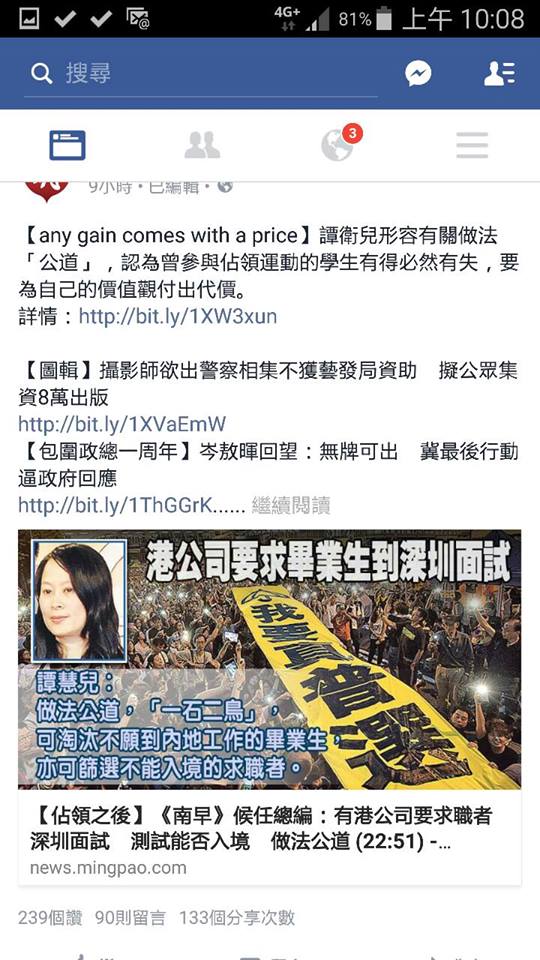
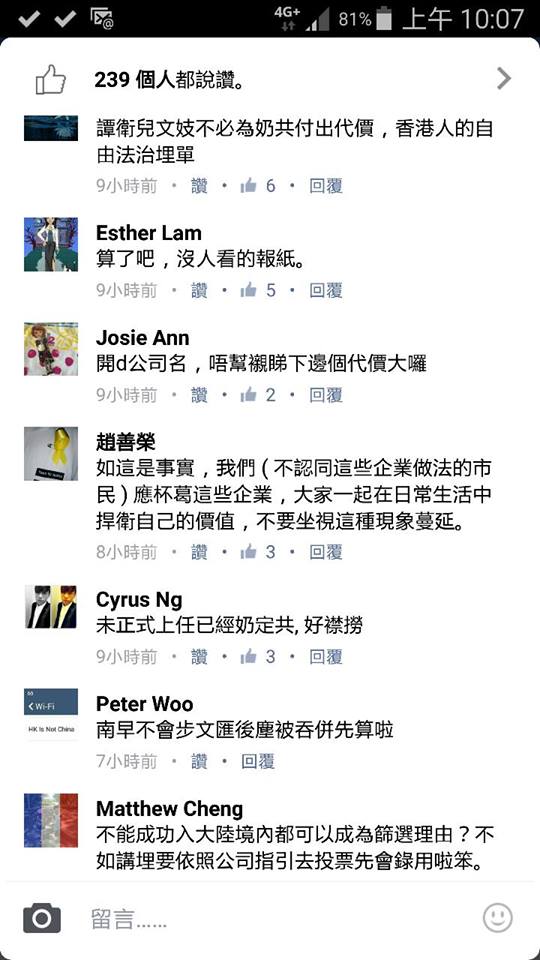
- Just two words:
Puk gaai!
- You'll have to pay a price too. You'll have to hire some mainland pig
instead!
- SCMP: RIP. Your downfall is complete.
- Thank you for caring.
- You would be fortunate not to work for such a petty-minded fake-Hong Kong
company.
- Shouldn't the Equal Opportunity Commission say something?
- The Equal Opportunity Commission is your mom.
- It works both ways.

- The literary prostitute Tammy Tam does not
have to pay a price for sucking up to the Communists. Instead, the people of
Hong Kong pay the bill with their freedom and rule-of-law.
- Forget it. This is a newspaper that nobody reads.
- How about the name of the company. If we don't patronize them, we'll see
who is paying a higher price.
- If this is true, we (the citizens who disagree with what these companies
are doing) should boycott those companies. We have to defend our values in
our daily lives. We cannot let this phenomenon spread.
- Tammy Tam is already sucking up to the Communists before she even takes
over the top post.
- Will South China Morning Post be taken over like Wen Wei Po?
- Can the inability to gain entry into mainland China be a reason for
selecting a candidate? Why not ask them to vote according to the company's
instructions?
- Cases in which students were denied entry
into mainland China:
#051 Hong Kong
Federation of Students leaders wanted to meet with state leaders
#196 Hong Kong
students want to sweep ancestors' graves during Qingming festival
- Who makes the hiring decisions at a
company? The boss? The board of directors? The manager who will be supervise
this new hire? The Human
Resources Department? The Workers Council? Labour Party legislator Lee Cheuk-yan?
The Hong Kong Federation of Students? The Equal Opportunities Commission?
The South China Morning Post commentators?
Please wake me up when you come to an answer.
- Hong Kong leads the world in the Economic
Freedom Index of the
Heritage Foundation. All this will be lost if simple things such as hiring decisions are
going to be mandated by political forces.
- This is the lesson of freedom. All young
wastrels have the freedom to take any job that they want; they even have the
freedom not to work while on the job. Meanwhile companies do not have the
freedom to hire. This is a brand new lesson to me, just like seeing how the
none of the Umbrella Soldiers dared to show their yellow umbrellas during
the district council elections.
- Working does not mean just punching in at
9am and punching out at 6pm. You are not just doing time at the office.
There are many other issues involved. For example, there are other people in
your company, either at the same site or elsewhere. Some of those co-workers
may be mainlanders. If your Facebook calls for the extermination of all
mainland locusts, should the company hire you?
- When they recruit firefighters, they
administer a physical test (such as carrying 75 kilograms of weight up one flight of
stairs) in order to make sure that the candidates are physically able. In
like manner, when they recruit someone to liaise between Hong Kong and
mainland China, shouldn't they make sure that the candidates are able to
travel between? Why waste everybody's time?
- It is not enough to ask the person to
show his/her Home Visit Permit, because it may have been voided. The only
way for sure is to see that the person has successfully made the trip.
- We need to have a Facebook where job
applicants will list the names of all the companies who hold Shenzhen
interviews. Then we will have a mass consumer boycott of those companies.
We'll make them pay.
- If that company won't hire you, you can
always work for Apple Daily/Next Magazine/Epoch Times. Their reporters are
not allowed in mainland China, so your inability to travel won't be a
handicap. In fact, it will be a badge of honor.
- You don't have to be in the mainland in order to cover the news there.
There is always the Internet, where you can pick up breaking news from
websites such as Aboluwang, Epoch Times, NDTV, Boxun, etc. Or you can do
better by making your own shit up.
- Any company that screens candidates with
Shenzhen interviews is a lousy company to begin with. Good riddance.
- Yes, and you have a case of sour grapes.
- If you can't work in China, you can go
work in the United States. That's even better.
- Yes, but your English sucks.
- Any company that screens candidates with
Shenzhen interviews is incurring a higher cost.
- How so?
- They have to send their Human Resources Department people to travel to
Shenzhen to hold the interviews. They probably had to rent a room as well.
- Do you think that the HR people mind? They'll go to Shenzhen after work
today, have a super-cheap authentic Sichuan hot pot dinner, go to a massage
parlor and get the whole package, and wake up in the morning for the
interviews. Do you think that they will complain?
- Look, this is just the first interview. They can outsource to a mainland
headhunter for a couple of hundred yuan to handle 100 candidates coming in.
They'll just hire some young punk for the day to check ID's and collect signatures at the
door. That's all. Afterwards, the screened candidates get to meet the big
honchos for the second interview in Hong Kong.
- Many of the arguments here are
confounding economics and politics. The decision is analyzed in terms of
politics when it is really about economics. Let us say that this company
wants to hire a coordinator between its Hong Kong headquarters (including
sales and operations) and the mainland production facilities (whether
owned-and-operated by the company or outsourced suppliers). Before starting
the production lines to produce 2 million units, someone has to go from Hong
Kong to mainland China to do the final quality control check. That person
has to be willing and able to do the job. Therefore, all those who
are unwilling and/or unable should be screened out. It is that
simple. If you insist that the person must be hired because of his politics,
then you'll have to explain how the job can be done. By watching the
production activities on a live video feed, perhaps?
- The answer is simple. This person must be hired because of his politics.
To get the job done, you hire another person. It is that simple. You are
trying to deny the simple reality.
Remember the days of Occupy
Central, when the ultimate weapon was going to be a territory-wide
school/labor/business strike that will paralyze Hong Kong completely until all
the demands are met. The story even made it into TIME magazine.
(TIME)
Hong Kong Trade Unions Call for Strikes as Democracy Protests Swell. September
29, 2014.
The Hong Kong Confederation of Trade Unions
(HKCTU) has called for a strike Tuesday in support of the cityÆs snowballing
democracy protests.
The call came after the cityÆs largest
teachersÆ union, the Hong Kong Professional TeachersÆ Union (HKPTU),
declared a strike in response to policeÆs forceful crackdown on
demonstrators on Sunday. ôHong Kong police used ruthless force to expel
harmless citizens, inflicting injuries on demonstrators with the use of
weapons, acting as enemies of the people,ö read a statement released by
HKPTU. On Monday, education officials expressed their ôdeepest regret over
the Professional TeachersÆ Union initiation of a class and teaching
boycott.ö The unionÆs decision to strike comes a week after student protest
groups walked out of classes in response to BeijingÆs decision last month to
implement restrictive elections for the position of Chief Executive, the
cityÆs highest office, in 2017.
Earlier on Monday, HKCTU asked workers to
strike en masse, using language rarely seen in this mercantile enclave.
ôHKCTU calls for all workers in Hong Kong to strike tomorrow, in protest of
the ruling of the National PeopleÆs Congress, as well as the brutal
suppression of peaceful protest by the Hong Kong government,ö said the
group. ôWorkers and students must unite to force the totalitarian government
to hand state power back to the people.ö
And the net result?
(SCMP)
From students to company bosses, Hongkongers show support for Occupy Central.
September 30, 2015.
At the government headquarters yesterday,
Don Chan Hing-lung, chairman of the Swire Beverages (HK) Employees General
Union, told cheering protesters that 200 delivery workers at a Coca-Cola
plant in Sha Tin had gone on strike to support the civil disobedience
movement. "We don't care if we lose money. We are here for the future. If we
don't come, there won't be one," Chan said. Another 100 workers, he said,
worked the minimum number of hours required by their contract. Chan said the
workers would continue their strike today.
Fast forward to now and we have a strike at
three Tai Po primary schools. Parents at three schools said that they will
withdraw their children from school for three days in a row to demand the
Education Bureau cancel the Primary 3 Territory-wide System Assessment.
This was going to be a devastating strike because many parents and students
had signed up beforehand.
Here is the battlefield report from Day One.
(Oriental
Daily) December 8, 2015.
At the Sacred Heart of Mary Catholic
School, the vice-principal Wong Kwong-chiu said that four students were
absent today due to either illness or personal matters. None of the parents
used the strike as the reason.
At the Tai Po Methodist School, there were
no absentees at all today.
At the Sun Fong Chung Primary School, the
principal Lo Sau-chi said that 8 students were absent today. One of the students
was in a competition outside school. The other seven students were ill, with
three from Primary 1 and one each from Primary 2, 4, 5 and 6. None were from
Primary 3. Principal Lo said that the school does not see any sign of a
strike.
Parent Mr. Wong who had joined in the
discussion of the parent/student strike said that it may be too early to
tell, because the parents/students can still walk out en masse before the
end of the day.
Internet comments:
- Wait? Did that whatever anti-TSA
Concern Group say that over 40,000 parents have signed up? Where did they
all go?
- Mr. Wong is right. When the bell rings
to indicate the end of the school day, all the students and teachers will pour out of the
classrooms to join the strike.
- Don't be silly. If the kids don't do
their TSA drills, their school will be ranked poorly. When the kids apply
to the good Secondary Schools, their grades will be downgraded because of
the poor ratings of
their Primary Schools. That's the only thing that matters.
- Classical Yellow Ribbon strategy: You
tell everybody else to charge while you lurk behind to cheer and harvest
the halo.
- They pushed two Primary 3 boys in front
of the media spotlight. That was horrible. But at least they have the
decency not to push more Tai Po Primary 3 children to go on strike.
- Do you think that the Primary 3 children can go on strike by themselves?
The children will be doing whatever their parents say. Can any parent
stand up to the public pressure after seeing what happened after the Legco
testimonies?
(Hong
Kong Free Press) Google refused police æfalse messageÆ request to take
down brutality video. December 7, 2015.
The Hongkong police requested Google to
remove a video posted online which showed apparent police brutality:
officers assaulting a person under arrest in a police vehicle. The
technology company did not take it down.
GoogleÆs latest semi-annual transparency
report said that the Technology Crime Division of the Commercial Crime
Bureau requested the removal of the video on YouTube for allegedly spreading
a false message. The report covers July to December 2014, but Google did not
reveal which video it was or when the video was made and uploaded.
In June 2014 , five activists
claimed they were assaulted in a police van after they were arrested at a
protest against development in the northeastern New Territories. Jaco Chow Nok-hang,
one of the five activists, said that the police may have requested Google to
take down a video recreating the scenes in which they were beaten up.
Last December, a protester also claimed she
was sworn at and slapped inside a police van after she was arrested at a
ôGau Wuö protest.
(SCMP)
December 8, 2015.
Hong Kong made five requests to remove a
total of 24 items in the second half of last year, including a YouTube video
that showed police assaulting a person under arrest, according to the latest
Google report.
Google refused to remove the video, despite
a request from the technology crime division of the commercial crime bureau,
which claimed that it "disseminates a false message that Hong Kong police
assaulted a person under arrest in a police vehicle", the report says.
The title or other details of the video
were not disclosed in the internet giant's biannual report. Both Google and
the police have been contacted for comment and to confirm whether the video
is fictional or a recording of real events.
Internet users are speculating that the
video in question might be one entitled Real Police Story, which is a
one-minute-long drama showing a policeman beating up an anti-northeast New
Territories development protester in a police van. The publisher of the
video said it was based on the account of a real protester's experiences.
A police spokesman declined to provide more
details about the video. He said, however, officers would follow due
procedure when it was necessary to require internet operators or websites to
provide information to help crime investigation or prevention, or law
enforcement. "The police will also be concerned about whether the
information involved is incorrect or seriously misleading," said the
spokesman. "The police always respect citizens' freedom of expressing
opinions, speech and assembly, but the public should also obey Hong Kong's
laws and social order when expressing their opinions and demands."
Internet comments:
- The most likely video is this
one:
https://www.youtube.com/watch?v=Uc_AoaQYQ_c. The title is <True:
Police Story>. It was published on June 18, 2014. It contains the disclaimer:
"This is recreated based upon the narrations of the demonstrators who were
assaulted." Two of the narrations are listed:
http://www.inmediahk.net/node/1023608
and
https://www.facebook.com/hkleft21/photos/a.463175861128.248308.341672231128/10152165770421129/?type=1&theater.
So this is not real documentary footage. It is
a recreation of an incident, in which the actor-demonstrator cannot be identified
in the poor lighting. As long as the video makes the disclaimer very
clear, there shouldn't be any problems with it.
The problem is that the first
five seconds of the video is clearly real documentary footage of the Hong Kong
Police removing a demonstrator whereas the rest of the video is show-time. This video is being posted onto social media
without the disclaimer so that the whole video appears to be a real
documentary footage in which the Hong Kong Police removed a demonstrator and
assaulted him inside a police van.
- (Apple
Daily @ YouTube) This is a news report of the Google story.
1:06 (Voice over) After reviewing the video, Google did not remove it.
Google did not identify which video it was. Of course, we will do our best
to find it for you.
1:10 (Voice over) Our clues include "between July and December last year,"
"police car" and "assault."
1:19 (Amy But) And then they used foul language to curse me, to scold me.
1:23 (segment of the video of the unidentifiable demonstrator being
assaulted)
1:30 (Voice over) These were the two better known incidents during that
period. Let me put on a helmet first. I am just suspicious. I am just
guessing. I am not saying that it is true.
Here is the Amy But incident as posted here
previously (#210).
[Oh, there is more there about Amy But before and after this incident.]
(Apple
Daily with video) December 27, 2014
On December 27, the 19-year-old woman
Amy But Wai-fan came to meet the press in the company of legislative councilor Lee Cheuk-yan,
who heads the Labour Party and the Confederation of Trade Unions. According to
her, when she entered the police van, she fell and was then pushed against the
window, leaving bruises on her arm. While in the police van, two plainclothes
police women slapped her in the face, ear and hands and cursed her out. This
lasted between 5 to 8 minutes. They threatened to file additional charges
against her if she dares to file a complaint against the police.
Amy said that she was "very scared" and
kept screaming "Don't hit me." She demanded a medical examination and asked for
the badge numbers of those who hit her. Instead, she was threatened with being
charged with assaulting police officers and interfering with police duty. She
did not dare to complain. She left after her family members brought her ID down
to the police station. Yesterday, she went to get a medical examination at the
hospital. The doctor said that she had a bruise mark on her left arm and a
swollen left ear.
Amy had been previously arrested during
the Causeway Bay clearance. She said that she joined the Shopping
Revolutionaries on Xmas Eve. Chaos broke out around midnight when someone
claimed to be "keeping guard over a bottle of milk on the road". At the time, she was standing on the sidewalk. Amy
said that the police beating and threats were white terror. She called for more
victims to come out.
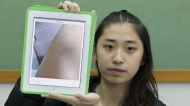

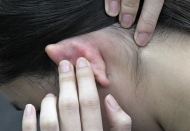
(SCMP)
Protester, 19, claims police officers beat her after arrest on Christmas Eve
December 28, 2014.
A 19-year-old pro-democracy activist has alleged
plain-clothes officers slapped her in the head until she bled as she was driven
to the Mong Kok police station just after midnight on Christmas Eve.
Amy But Wai-fan told her story to the media yesterday,
saying she had decided not to report the case to the Complaints Against Police
Office (Capo) - the force's internal investigation unit - as she had "no
confidence" in it. Her ear was still red and there was a bruise on her left arm.
But said she was one of 500 people on a "shopping tour"
protest - in which crowds walk slowly to disrupt commercial areas - on Shantung
Street. She was taken to a police car by five plain-clothes officers after she
failed to show her identity card. She alleges the officers assaulted her in the
car on the way to the station. "They slapped me three or four times à until my
ear bled," she said. "When I asked for their officer numbers, they threatened to
charge me with police assault and obstructing police work if I made a
complaint."
(SocREC)
https://www.youtube.com/watch?v=ufyykTsEiQM December 24, 2014.
The police runs an ID check on
the individuals in the unlawful assembly and this woman (later identified as Amy
But Wai-fan) has no ID. Due to her
intransigence, the police put her under arrest. The police woman informs her
that she is being arrested. The woman refuses to move unless the police woman
releases the hold on the arm. The police woman says that handcuffs will be used,
but the woman kept talking about releasing the hold on the arm. The woman
eventually enters one police van but was taken to a second van. The van does not
leave immediately. Now see the
follow-up news stories below.
Comment: The existence of the SocREC YouTube video is
not known to many people. Look at the video again and remember that the police
van did not leave immediately and hundreds of people were still milling around
when the woman was allegedly assaulted by 5 police officers in the police van for five to eight minutes.
Also, you may wonder why it was an "unlawful assembly." As Amy But said, she and
others were keeping guard over "a bottle of milk" on the road. Like dropping
coins, this is a ploy to block vehicular traffic to achieve a mobile Occupy
effect. The police will issue a warning (color-coded banner display/megaphone
announcements) first, then run an ID
check if the individual refuse to move on.
So Google might have reviewed the simulated video, saw
the disclaimer and thought it was okay. Google does not know (or care about) how YouTube videos
are embedded without disclaimers in social media such as Facebook, Twitter, etc.
(Hong
Kong Free Press) GovÆt says new copyright law will not restrict speech
amid concerns of parody ban. December 3, 2015.
The controversial Copyright (Amendment)
Bill 2014, which will receive a second reading at the legislature next week,
will not restrict freedom of speech, Secretary for Commerce and Economic
Development Gregory So Kam-leung has said.
The amendment bill has been dubbed
ôInternet Article 23ö û Article 23 being Hong KongÆs ill-fated national
security law. The bill is intended to extend the protection of copyright
owners to the internet. Netizens, internet freedom advocacy
groups and lawmakers have expressed concerns, however, that it could limit
the creation and distribution of derivative works, as it did not include an
open-ended exemption for ôuser generated contentö, a ôcontract overrideö nor
a ôfair useö term.
Under the new bill to be
discussed, netizens could be prosecuted for the offence of obtaining ôaccess
to a computer with intent to commit an offence or with a dishonest intentö.
They may face legal action from copyright owners if they use copyrighted
material for remixes.
The bill has
included a ôfair dealingö term following consultations in 2013. It states
that using copyrighted works for purposes such as parody,
satire, pastiche, caricature, criticism, review, quotation, education,
research and news reporting will not be an infringement of copyright.
However, netizens do not feel assured, as the exemptions may not cover
derivative works such as performers who cover songs, artists who
self-publish comic remixes, internet users who live-stream game playing and
song lyrics rewriting. Such activities may be considered criminal offences.
Lawmaker Raymond Wong Yuk-man is
to start a filibuster to stall the bill by proposing over 900 amendments.
Lawmaker Ray Chan Chi-chuen also said he will join the filibuster, and has
proposed an amendment to the bill to include ôfair useö term.
(Oriental
Daily with
video) December 5, 2015.
A number of groups gathered at
Sai Yeung Choi Street South (Mong Kok) to declare that they have formed an
alliance to apply pressure on the Legislative Council to veto the so-called
Internet Article 23.
Former Student Frontline member Cheng "Four-eyed Brother" Kam-mun spoke to
point out that only independent legislator Raymond Wong Yuk-man is
filibustering the bill. League of Social Democrats legislator Leung "Long
Hair" Kwok-hung was upset and went up to grab the microphone to declare that
Wong is not the only one because "When was I ever absent from any
filibustering?"
But
Leung's action angered the assembly. They cursed out Leung for seizing the
microphone. They also wanted Leung to guarantee that he will filibuster
Internet Article 23. Leung retorted: "Who are you to talk to me?" This
angered those present even more so. They asked Leung if he wanted to "rank
people by status" and "Am I not qualified to speak to you?" The scene was
chaotic.
After jostling
around for an hour, 10 policemen came to escort Leung away. The quarrel did
not end. Even after Leung promised that he will filibuster in the
Legislative Council, citizens did not buy it. A number of citizens trailed
Leung to curse him out with foul language. Someone said that Leung has been
disappointing. A citizen fell down on the ground. The quarrels continued
over at Soy Street.
In
the end, Leung got into a taxi and left. The citizens failed to stop the taxi
from departing. After Leung left, the citizens turned around to surround the
League of Social Democrats' Ma Won-ki. Passersby detoured around the scene
of the quarrel. After 30 minutes, Ma left on his own.
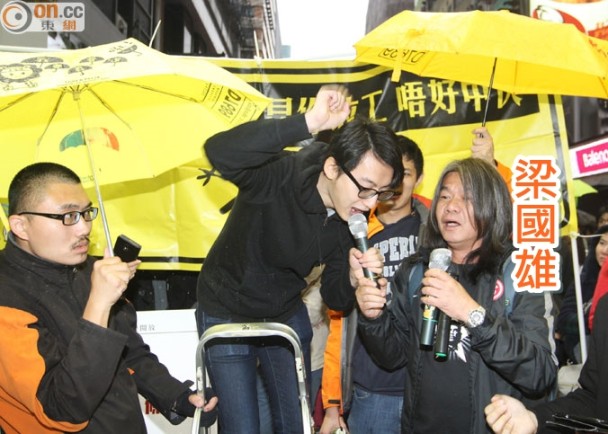
Eric
"The Painter" Poon, Cheng "Four-eyed Brother" Kam-mun, Leung "Long
Hair" Kwok-hung
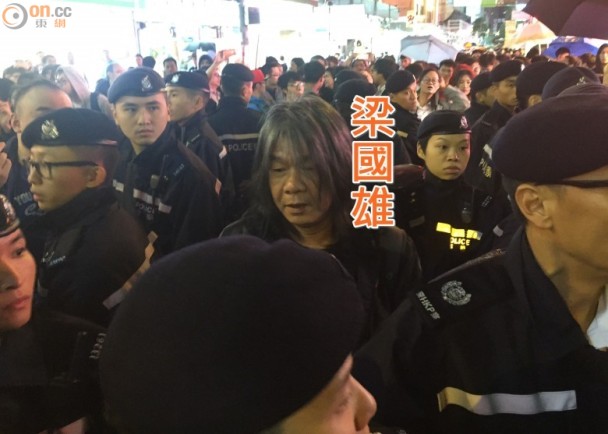
(Wen
Wei Po) December 5, 2015.
Yesterday at 5pm, a number of
groups including the League of Social Democrats, Youngspiration, Scholarism,
Civic Passion, Hong Kong Indigenous, the Shopping Revolutionaries which are
allegedly controlled by People Power, etc showed up to demonstrate against
Internet Article 23. Before the meeting even started, Leung Kwok-hung seized
the microphone and played "Big Brother" by issuing orders. The other
demonstrators boo'ed him and told him that there is no Grand Stage and nobody
is going to be allowed to play Grand Stage Master. So Leung put down the
microphone reluctantly.
Next, Cheng "Four-eyed Brother" Kam-mun came on and named People Power and
League of Social Democrats to join to filibuster in the legislative council. "Right
now only Raymond Wong has offered 904 amendments to the bill to delay
passage. The self-proclaimed radicals People Power and League of Social
Democrats have not joined in." At this time, Leung Kwok-hung went up to
seize the microphone to say, "Let me tell you. Raymond Wong is frequently
absent during filibustering ... Are you kidding!?"
These provocative words from Leung immediately
incensed the demonstrators. They surrounded Leung and demanded him to state
his position, using a lot of foul language. At first, Leung shouted back at
the demonstrators. He said: "You ask me whether I will filibuster? Who are
you to ask me whether I will filibuster? ... What are your qualifications?
No need to say more. Don't touch me!" But the demonstrators got more and
more excited, and Leung had to concede and promise that he will filibuster.
But he added that asking him whether he will filibuster or not is like
asking him whether he eats or not. The demonstrators refused to take that
for an
answer. They surrounded him, they yelled at him and they did not allow him
to leave.
After being
surrounded for more than one hour, Leung finally called the police (whom he
has frequently called "Black/Evil/Bad Police") for help. More than a dozen
police officers formed a human chain to escort Leung out.
Several other League of Social Democrats
members also got into argument with the demonstrators. After Leung left
them, LSD member Ma Won-ki was surrounded by almost 100 demonstrators. A
demonstrator claimed that he was injured by Leung's lackey Ma. The police
took Ma away. It was rumored at first that Ma was arrested on suspicion of
physical assault. Later, it turned out that Ma left under police protection.
On the Internet, there was plenty of scorn
heaped on Leung Kwok-hung and the League of Social Democrats.
Videos:
(NOW TV)
http://news.now.com/home/local/player?newsId=160467 News report on the
assembly in Mong Kok. More than 10 civil groups (including Keyboard Frontline,
Civic Passion, and many post-Umbrella groups) met to hold a press conference
to state their opposition to Internet Article 23. Leung Kwok-hung argued with
some groups, and left under police escort.
(Passion Times)
https://www.youtube.com/watch?v=TAG7h2mZ5r4 Cheng "Four-eyed Brother"
Kam-mun addressed the assembly. Cheng said that it is not sufficient for the
legislators to vote against the bill, because there are more pro-establishment
legislators than pan-democratic legislators. At the present, only Raymond Wong
has offered more than 900 amendments. He hopes that the so-called radical
legislators must also join the filibustering. When Cheng asked Leung to join
the filibustering, the latter seized the microphone and said: "Let me tell
you. Raymond Wong is often absent during filibustering. Are you kidding?"
(Passion Times)
https://www.youtube.com/watch?v=8AA_cGpsNFE Cheng Chung-tai (Civic
Passion) addressed the assembly. He presented a straightforward case: Civic
Passion opposes all evil laws, including Internet Article 23 which is
intended to destroy the peole of Hong Kong. Cheng said that the
pan-democratic legislators must vote against the bill. More importantly,
every possible means must be employed to stop the hearing on this evil bill.
If the government passes the bill by force, the pan-democratic legislators
must escalate their action.
(Passion Times)
https://www.youtube.com/watch?v=3e9B6GFxHhk After the press
conference, Leung Kwok-hung is surrounded by citizens who demand to know
whether he will filibuster. Leung said that Raymond Wong has submitted more
than 900 amendments and he will give a hand.
(Passion Times audio)
https://www.youtube.com/watch?v=K0HYFE-Nock A citizen who confronted
Leung said that Leung told him: "Do you eat meals?" "Are you a voter?" and
"Eat shit!"
(Passion
Times)
https://www.youtube.com/watch?v=3gBhEMRACOg Leung Kwok-hung was
surrounded by citizens for more than 30 minutes. Leung was escorted away
from the pedestrian mall by a chain of more than 10 police officers.
(SocREC)
https://www.youtube.com/playlist?list=PLq0qI4oV8aMr3E9augzNRmiXUzw5wxxOT
Keyboard Front: Internet Article 23 complete coverage.
(SocREC)
https://www.youtube.com/watch?v=ICol1QC55B8 Part 1
(SocREC)
https://www.youtube.com/watch?v=6FV1QYER3_I Part 2
(SocREC)
https://www.youtube.com/watch?v=IIrouspibG8 Part 3
(SocREC)
https://www.youtube.com/watch?v=0PZFh84aumI Part 4
(SocREC)
https://www.youtube.com/watch?v=liSKB2G_1wI Part 5
(SocREC)
https://www.youtube.com/watch?v=f5fompsj_mM Part 6
(SocREC)
https://www.youtube.com/watch?v=KsKKfN5LyKU Part 7
(SocREC)
https://www.youtube.com/watch?v=-SBlnM7mHpc Part 8
(YouTube)
https://www.youtube.com/watch?v=DMGNGO4N_vU Preparations for the
press conference Part 1. Leung Kwok-hung, Han Lian-shan and Eric Poon
arrived early.
(YouTube Part 2)
https://www.youtube.com/watch?v=ClN7h_mUbEY Preparations for the
press conference. Leung Kwok-hung, Han Lian-shan, Umbrella Parents' Dorothy
arrived early, plus the man in gray clothes who escorted Leung away later.
(Facebook)
https://www.facebook.com/100003868649005/videos/622979554507660/
Leung Kwok-hung argues with demonstrators.
(Facebook)
https://www.facebook.com/mediaofhongkongstudents/videos/777416209070871/
Leung Kwok-hung argues with demonstrators.
(Facebook)
https://www.facebook.com/hongkongpignews/videos/919242338130176/
Leung Kwok-hung prevented from leaving.
Internet comments:
- Who is going to win this one?
According to
Oriental Daily, the bill will pass.
According to information, the
American Chamber of Commerce and certain local audio-visual entertainment
companies have applied pressure on Legislative Councilors to pass the bill as
quickly as possible. US consul general Clifford Hart has met with the most
adamant opponents of the bill -- Chan Chi-chuen (People Power) and Claudia Mo
(Civic Party) -- and told them Hong Kong is decades behind the western world
when it comes to protecting intellectual property rights.
Claudia Mo said that she is squeezed between
intellectual property right holders and Internet users, and she needs to
find a balance between protecting intellectual property rights and
creative freedom. She is personally leaning towards a veto, but "that
would be ignoring intellectual property rights." Thus, the Civic Party is
still wavering.
Chan
Chi-chuen said that he would vote against the bill, but he does not intend
to join the filibustering.
Neo Democrats' Gary Fan Kwok-wai said that
he would vote against the bill if all of the pan-democrats' proposed
amendments are voted down.
Labour Party's Cyd Ho said that they opposed
the criminalization of certain intellectual property right violations, but
they think that the "safe harbor" exemptions in the bill are a good thing.
Therefore, the Labour Party may abstain.
Democratic Party's Sin Chung-kai recommends
that his party support the bill in order to advance technological
innovation in Hong Kong.
- The intentions of the major
pan-democratic political parties
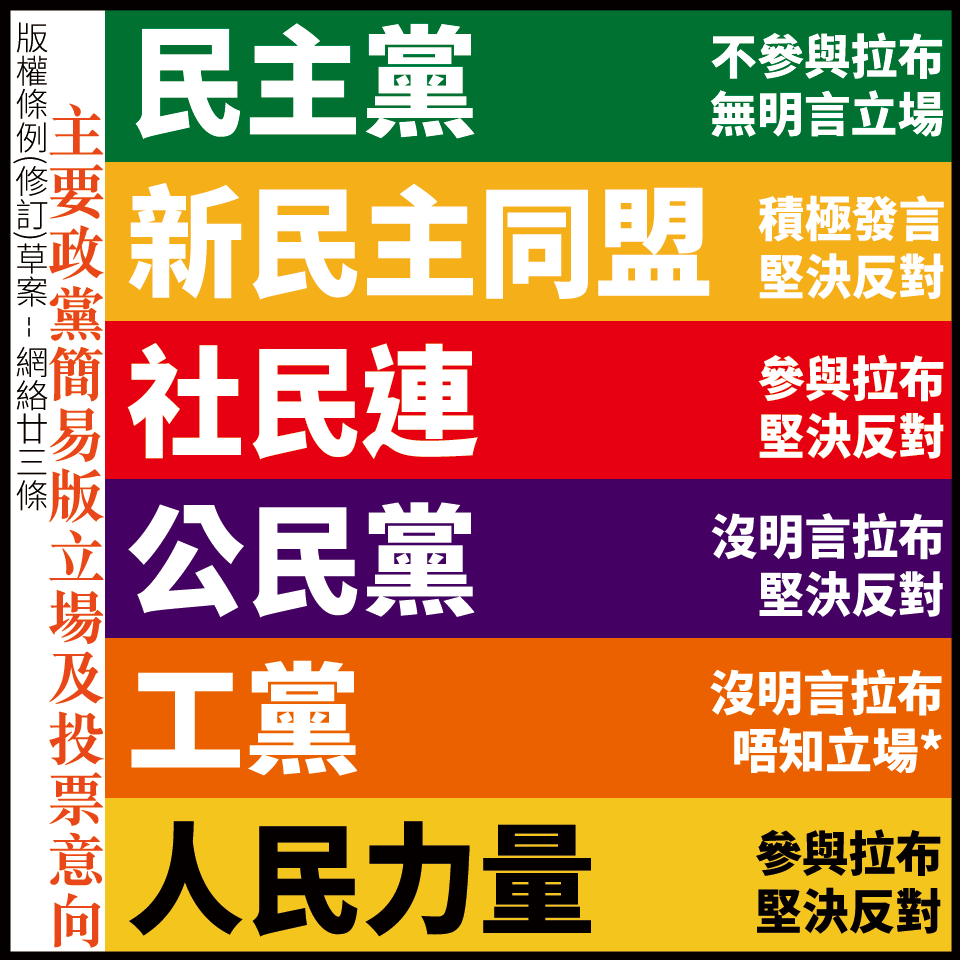
Democratic Party -- won't filibuster; no clear position on voting
Neo Democrats -- speak actively; firmly opposed
League of Social Democrats -- filibuster; firmly opposed
Civic Party -- no clear position on filibustering; firmly opposed
Labour Party -- no clear position on filibustering; no clear position on
voting
People Power -- filibuster; firmly opposed
- The Hong Kong audio-visual entertainment
companies are also coming out on the side of the Copyright Bill. Why? In
1993, movie box office receipts in Hong Kong totaled up to $1.13 billion. In
2013, movie box office receipts in Hong Kong totaled up to $354 million. Box
office receipts shrank because people could easily download pirated copies
off the Internet.
In
1989, music records sales in Hong Kong hit the peak at $2.5 billion. In
2013, music record sales in Hong Kong was just $400 million. This is
according to the International Federation of Phonographic Industry (IFPI).
Hong Kong will never have an
vibrant audio-visual entertainment industry if it is unwilling and/or unable
to protect intellectual property rights.
- Why ask Leung Kwok-hung if he will
filibuster? As he said, this is as automatic for him as "eating." People should
be asking the Democratic Party, the Civic Party, the Labour Party and the
other so-called pan-democratic legislative councilors. It is possible that
they will all go to watch Japanese autumn leaves (koyo) on voting
day.
- Asking "Does
Leung Kwok-hung filibuster?" is the same as asking "Is
the Pope Catholic?"
- So why is this being asked now? Sectarianism. It is Civic Passion versus
League of Social Democrats. It was just harassment. Whatever the answer
coming from Leung, it won't satisfy the
Spanish Inquisition. It will only beget more harassment.
- Score was Raymond Wong 903 and Leung
Kwok-hung 0. (NOW
TV) But Legislative Council chairman Jasper Tsang has ruled that
most of Wong's amendments are either unrelated to the issue, frivolous,
incomprehensible and/or different in meaning between the Chinese and English
versions. This leaves only 42 amendments up for debate. So the revised score is
Wong 42, Leung 0. Meanwhile DAB legislator Chan Kam-lam's 12 amendments had
10 related to contract overrides and fair use accepted. So Chan has a much
higher batting average than Wong, but a lot fewer at-bats.
- Erica Yuen Me-ming (People Power chairman):
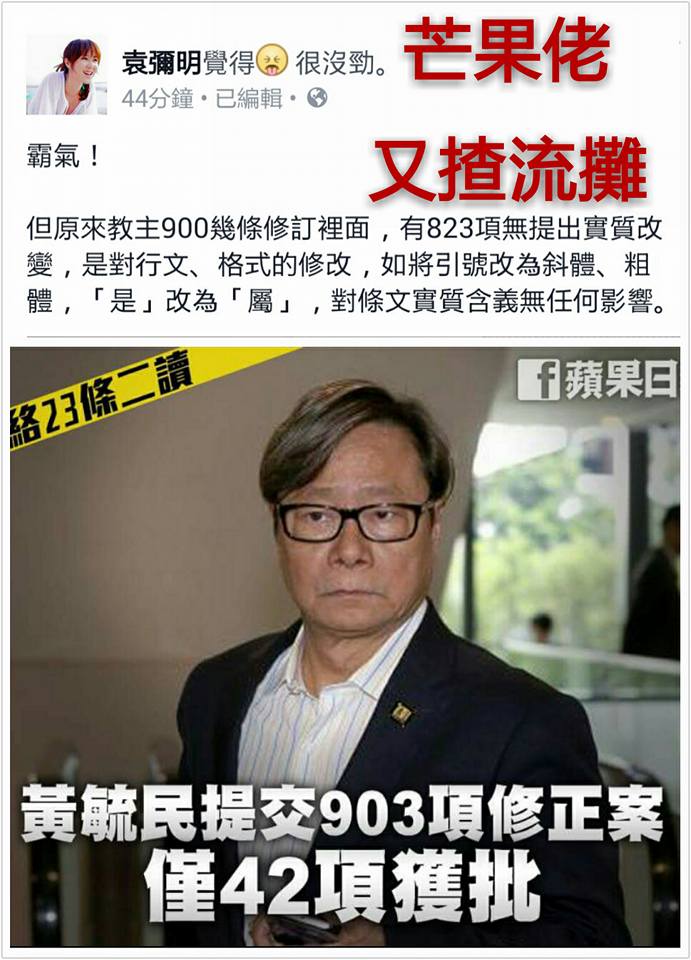
Out of the 900+ amendments, 823 were about writing styles (for example,
changing the quotation marks to slanting/bold style; the word 'is' to
'belongs to') without any impact on the contents.
- (Cable
TV) Raymond Wong said that Tsang's rulings were politically
motivated. Of course. Does the sun rise from the east?
- 42 out of 903 is a pretty good batting percentage. Earlier this year, the
League of Social Democrats submitted 3,349 amendments to the budget proposal
and only 63 were approved for debate. That's a lot worse.
- (Oriental
Daily) December 6, 2015.
The next day, Leung Kwok-hung
said that those people who surrounded him wore surgical masks but they were
surely Yellow Ribbons. Leung said that people can express their opinions, but
they "shouldn't be insulting other people's mothers." Leung said that normally
if he is insulted this way, he would have gotten into a fight "even if that
means going to jail." When asked if he is afraid to go to Mong Kok again,
Leung said that he has offended so many people already but that doesn't mean
that he can't walk in the streets.
LOL. Leung Kwok-hung listens to
an hour of "Fuck your mother" and he is ready to start fisticuffs. During
Occupy Central, the police officers put up with 14 hours of insults every day.
Is that normal? And by the way, if someone pours urine on Leung, would he drag
the perpetrator over to a dark corner and beat him up?
Relevant links:
"Long Hair" Leung
Kwok-hung versus C9; Leung
Kwok-hung by the Roadside
P.S. And did anyone ask for Leung Kwok-hung's
opinion on
Couple vs Policeman?
- When you need the police, they're "Police
Uncles." When you don't need the police, they are "Evil/Black/Bad Police." From
the photo, it looks Leung Kwok-hung needed the police today.
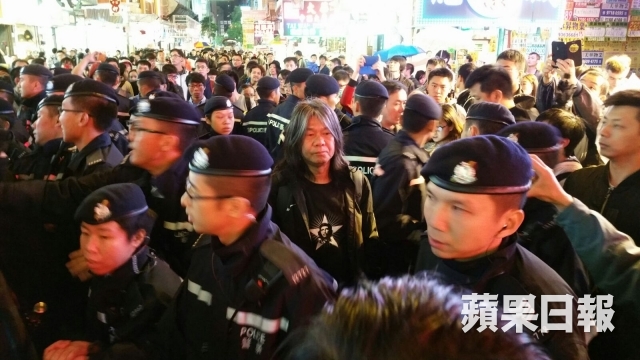
- They may say that there is no Grand Stage.
But all the small parties are out there to seize the flag (leadership).
Civic Passion, League of Social Democrats and People Power are
indistinguishable from but also incompatible with each other. They take every
opportunity to take down the others. Thus, Civic Passion came out today to attack
the League of Social Democrats.
- (Bastille
Post) When "Four-eyed Brother" said that "even if all the
pan-democrats voted against the bill, it will still pass," he has fingered the
internal contradictions within the pan-democrats. A number of US-friendly
pan-democrats are leaning towards passing an appropriately amended bill. For example,
Democratic Party's Sin Chung-kai supports an amended bill which includes a
number of exemptions. He said that the bill has been discussed for almost ten
years. Foreign governments are concerned about intellectual property right
violations in Hong Kong. If the bill is vetoed, the Office of he United States
Trade Representative may place Hong Kong into the
Special 301 Report on
Intellectual Property Rights watch list. That will negatively affect Hong Kong's
reputation and economic interests.
- (Ta
Kung Pao) The so-called Internet Article 23 press conference was
called by a number of organizations with more than 50 persons present. The
celebrities included Keyboard Frontline's Glacier Kwong, League of Social
Democrats legislator Leung Kwok-hung, Youngspiration convener Baggio Leung,
Scholarism convener Prince Wong, Cheng "Four-eyed Brother Kam-mun, Civic
Passion's Cheng Chung-tai, etc.
Are there really so many different
organizations? Not really, because they are interlinked and overlapped.
Basically it is a situation of League of Social Democrats versus Civic
Passion. For example, Keyboard Frontline and Civic Passion may seem to be
different organizations. But Glacier Wong under the nickname of Ah Bi is a
Passion Times program host, and often appears with Civic Passion's Wong
Yeung-tat and Cheng Chung-tai. At the July 29th Hong Kong University council
meeting, Hong Kong University student Glacier Wong charged into the meeting
room and did a live broadcast for Passion Times. Today's press conference
organized by Keyboard Frontline used audio-visual equipment and tent with
the Civic Passion logo. Afterwards, Glacier Wong gave special thanks to
Civic Passion for their assistance.
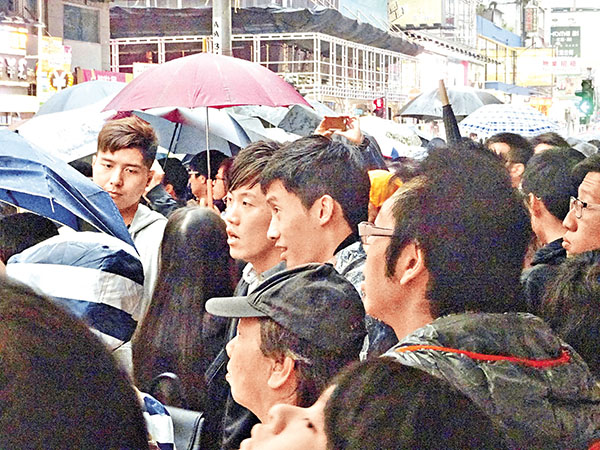
Cheng Chung-tai (Civic Passion) whispering
with Baggio Leung (Youngspiration). Will Youngspiration be absorbed into the
youth political branch of Civic Passion?
- (Apple
Daily) Neo Democrats' Gary Fan Kwok-wai said: "I am surprised that
people deliberately raised doubts about whether Long Hair would filibuster.
I watched the video afterwards. Leung clearly stated that he will
filibuster. But the citizens refused to listen and continued to surround
him. I find it very regrettable, because the event was meant to unify civic
society to oppose Internet Article 23. But now the attention is shifted towards
internal contradictions among the people. The gun is pointed inwards and not
against the authorities. I think it is shameful if this is a deliberate
plot to lay siege to Long Hair."
- Cheng ("Hot Dog Worm") Chung-tai's Facebook
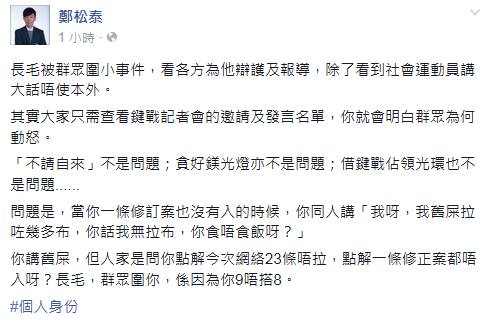
Long Hair being surrounded by the crowd is a minor incident. But reading
the news reports and commentaries made in his defense, I can only see how
the League of Social Democrats can lie without any compunction.
Actually, if you check the list of people invited by Keyboard Frontier, you
will know why people were angry.
It is alright for you to come uninvited; it is alright if you want media
exposure; it is alright if you want to share the aura of Keyboard Frontline
...
The problem is when you haven't filed a single amendment and then you tell
people: "As for me, I have filibustered previously. You are saying that I
didn't filibuster? Do you eat?"
You want to talk about past history. But people are asking you whether you
will filibuster Internet Article 23. And why haven't you submitted a single
amendment? Long Hair, people surrounded you because your answer was
unsatisfactory.
-
Derivative art poster (note: the kind that may get banned under "Internet
Article 23")
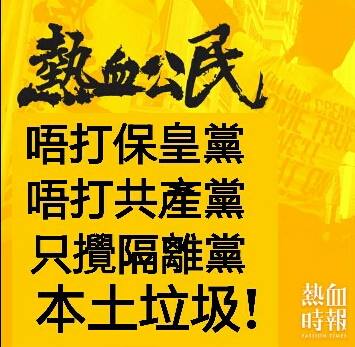
Civic Passion
They don't fight the pro-establishment camp
They don't fight the Communist Party
They only fight similar political parties
Local trash!
- It's
always the same old set of people being recycled.
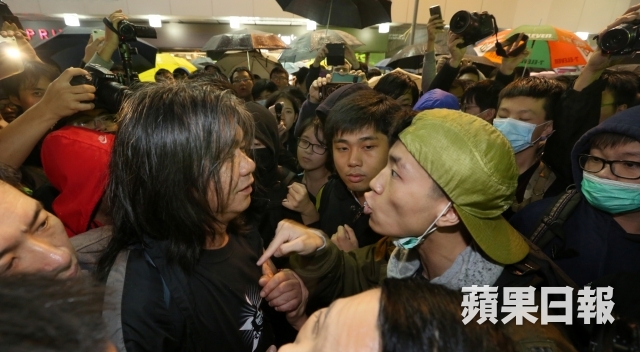
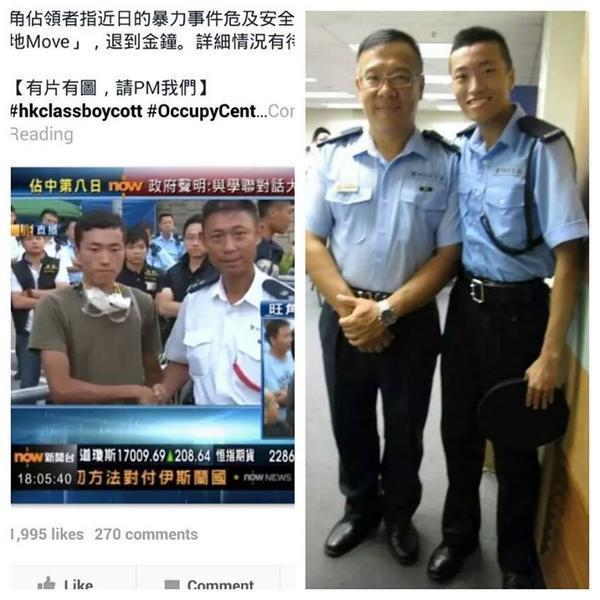
(Oriental
Daily) The angry man in the light green cap yelling at Leung
Kwok-hung has been identified as Joe Yeung. At the scene, Yeung identified
himself as the incoming president of the Shue Yan University Student Union
president. Last October, the demonstrators surrounded Government
Headquarters and the Chief Executive's Office and stopped the supplies going
to the police officers inside. Legislator Leung Kwok-hung came over to talk
to the demonstrators to allow the police bring in supplies. Joe Yeung was
one of the demonstrators. Later there was a photo of Joe Yeung shaking hands
with the police as the demonstrators withdrew. From that photo, Internet
users found out that Joe Yeung is an auxiliary police officer. They suspected him
of being a police mole. Yeung said that he resigned from the auxiliary
police force afterwards.
- What is the significance of
Joe Yeung wearing a green hat? Everybody knows that the
Green Hat
is a No-No in China.
- Joe Yeung's name sounds just like
遭殃(=run
into a disaster) in Cantonese.
- (Oriental
Daily) December 6, 2015. Leung Kwok-hung said that he was angry at
Cheng "Four-eyed Brother" Kam-kun for raising doubts about whether Leung would join
the filibustering. Leung said that Cheng was arrested during Occupy Central
and Leung visited Cheng in jail. At the time, Cheng did not have a lawyer,
so Leung put up a guarantee on his behalf. Thus, Leung is implying that
Cheng is an ingrate.
-
Actually, everybody knows that there are enough votes at the Legislative
Council to pass the bill, no matter how large the demonstrations are. Even
if there are clashes outside, or the Legislative Council building is
occupied, or some legislators start fights on the floor, the bill will still
pass. So what is to be done? Well, after the bill is passed, we can conduct
a massive campaign to violate exactly what is banned in the bill. The law is
possible only because the majority quietly obeys it. If there are mass
violations, the law becomes unenforceable.
- The reasons why Internet Article 23 must be
opposed:
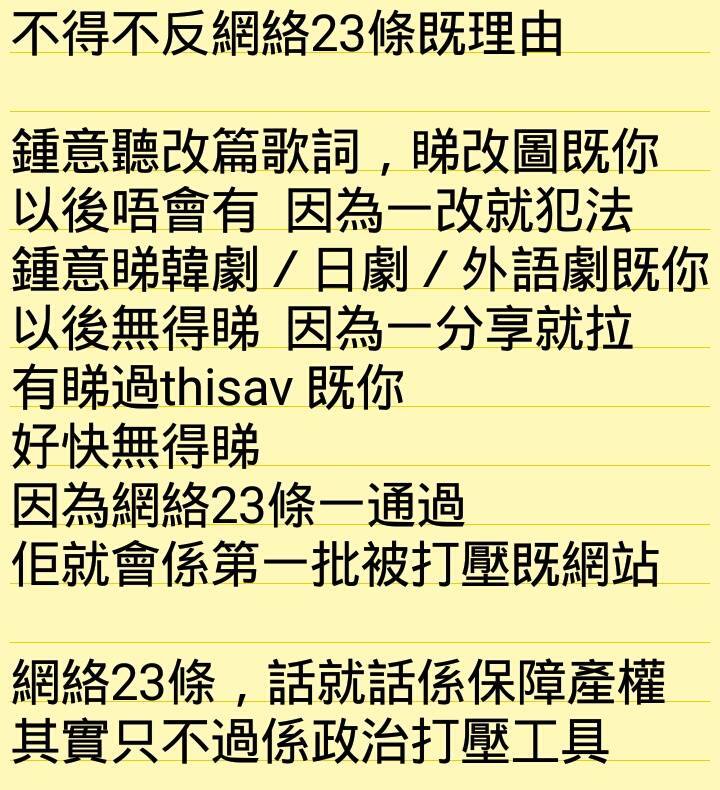
You who like to listen to modified lyrics or photos won't be able to do
so
because it is a crime as soon as the law is amended
You who like to watch Korean/Japanese/western drama won't be able to do so
because it is a crime as soon as you share
You who have watched thisav won't be able to do so
because it will be among the first group of websites to be banned
Internet Article 23 -- it is supposed to protect intellectual property
rights
but it is actually a tool for political oppression
Of course you still want to watch Korean,
Japanese and western dramas, and you want to access thisav. But think
about this -- you made an adult video in which you got your brains fucked
out and then everybody comes to thisav and watch it for free. Will
you be pissed off?
- Next
steps? Keyboard Frontline has organized an assembly on Wednesday from 10am
to midnight with what they say will be 1,000 demonstrators. The police are
paying close attention because a physical attack of the Legislative Council
building occurred last year when someone posted a rumor about an Internet
Article 23 vote. See
#055 and #057.
(Wen
Wei Po) December 4, 2015.
It is no fresh news that a small
number of Hongkongers hate mainlanders and don't want to be Chinese. But it is
rare that such views are articulated on university campuses. This story began
when a Hong Kong Polytechnic University public display system began to show
the message "Hong Kong is not China." It is not known who arranged it.
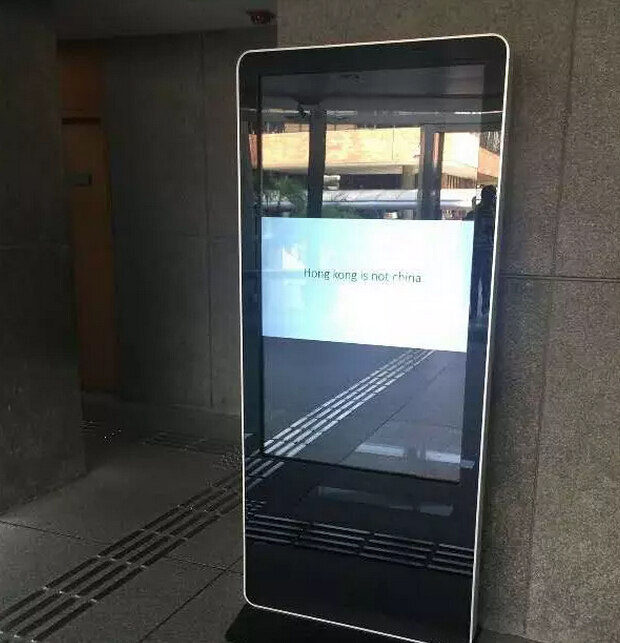
The same message was then posted on the
Democracy Wall at PolyU. Angry mainland students ripped the NOT off. A
mainland student posted a rebuttal:
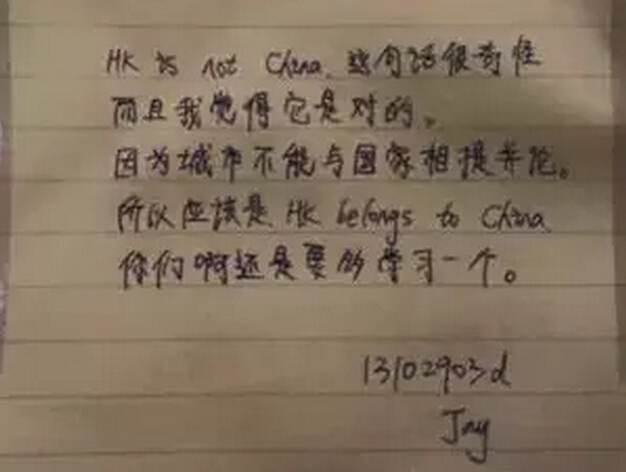
"Hong Kong is not China." This is a
peculiar phrase
but I think that it is correct.
A city cannot be compared to a country.
Therefore, it should be "HK belongs to China."
You should be learning some more.
ID: 13102903d
Jay
Another mainland
student wrote:
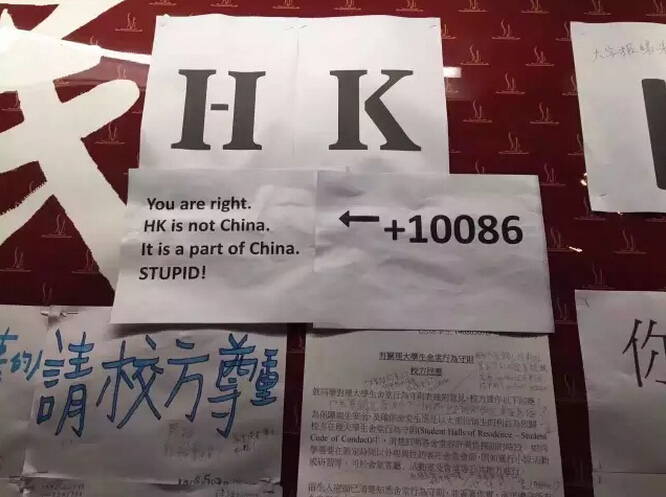
"+10086" is mainland Internet idiom for "strongly support."
This matter came to the attention of
Passion Times which promotes radical localism. They posted the Hong Kong
students' counterattack of "You can disagree but you cannot tear off the
paper" to show that mainland students don't appreciate democracy. They also
insulted the mainland students for using simplified Chinese characters which
are "deformed characters."
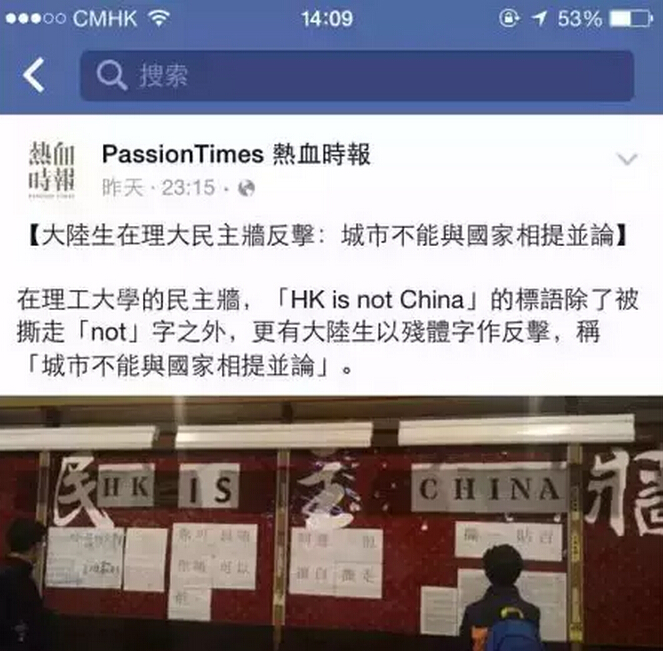
Passion Times
At the Democracy Wall of Poly U, the "NOT" in the "HK IS NOT CHINA" banner
was ripped off. In addition, mainland students used deformed characters to
propound the idea that "a city cannot be compared to a country."
But Passion Times drew the attention of a
mainland student named Liu Zihao, who posted:
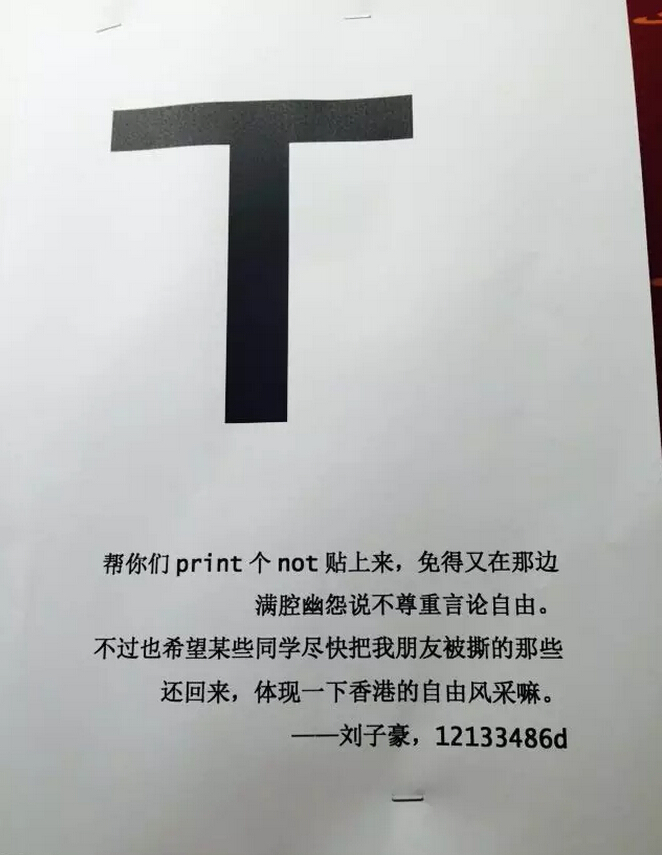
Let me help you by printing a NOT so that you don't whine about the lack
of respect for freedom of speech.
But I hope that certain other fellow students can restore the posts made by
my friends, in order to show us the magnificence of freedom in Hong Kong
Liu Zihao, ID 12133486d
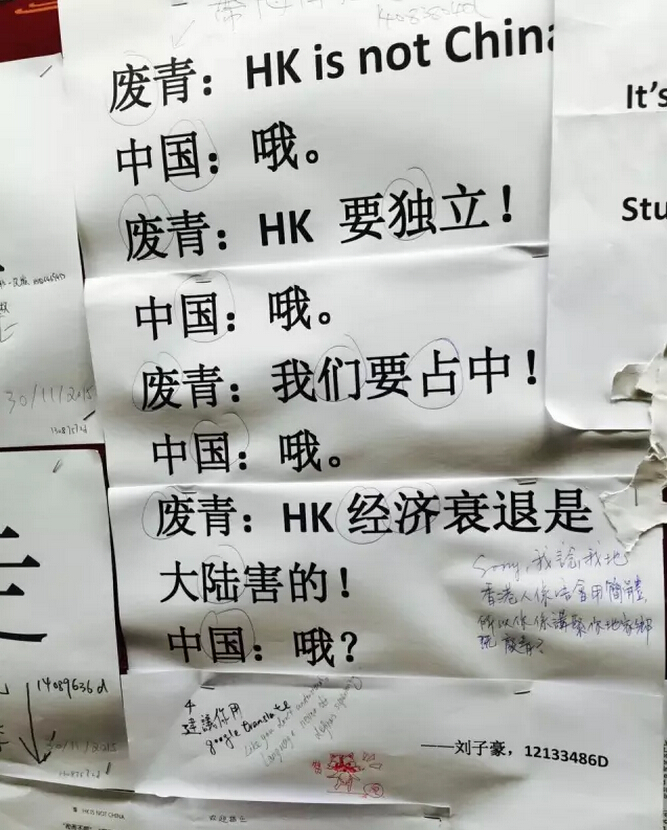
(Defaced poster)
Young wastrel: HK is no China.
China: Oh.
Young wastrel: HK wants to be independent
China: Oh.
Young wastrel: We want to Occupy Central!
China: Oh.
Young wastrel: HK's economic recession was caused by mainland!
China: Oh?
Liu Zihao, ID 121334860
Liu Zihao also responded to the
characterization of simplified Chinese characters as deformed. He used the
classical brush to write a text to explain that he had learned to write in
various traditional character styles, and he said his calligraphy in
traditional Chinese is better than Hongkongers.
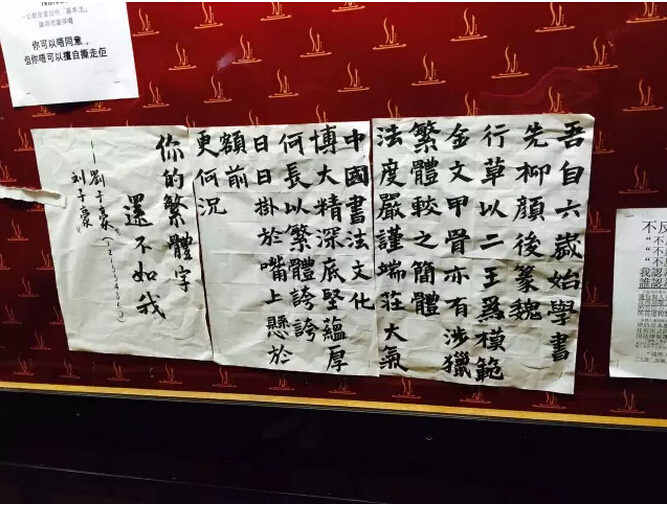
According to Liu Zihao, Hong Kong university
students find it easier to access information (for reasons that we all know)
than mainland students. But precisely because it is so easy, they tend to
believe what they want to believe without verification. As a result, they
will negate everything about the mainland. By contrast, mainland students
may encounter some barriers in accessing information. Because of it, they
tend to want to know the whole truth. They will not resist information, they
will examine and verify everything because they know that there is plenty of
misinformation out there. Thus, mainland students may encounter
barriers in accessing information but they don't have internal barriers
to resist certain information. Hong Kong students can freely access
information but they have internal barriers to resist certain information.
In this debate, the mainland
students showed superiority in logic, legalism and traditional culture. For
those Hong Kong students who continue to be absorbed by the meaningless
message posting and the public criticism/struggle against mainland students,
we want to tell them that someday you are going to enter society and
you will have to compete against us. At that time, you will regret that you
had wasted your valuable time on
so many meaningless things so as to lack any competitiveness.
Internet comments:
- In the Ming Dynasty, Mr. Liu's
name is written as
刘.
Centuries later in the Manchurian Dynasty, it is written as
劉.
In Hong Kong today, the traditional Chinese character is written as
劉. In mainland
China, the simplified Chinese character is written as 刘. So which is more in
line with Chinese tradition? You tell me.
- During the Song Dynasty, they used many of the so-called simplified
characters today. When the Manchurians took over, they complexified many of
the characters for political reasons (namely, to make the characters harder to
learn to read and write, and thus restrict education to only the few who can afford the
time and money). That is the origin of the traditional Chinese character
system today.
- The fact is that all living languages evolve
over time. Hongkongers have some ideal notion of a static traditional
Chinese language for which they are the true holders. That is delusional.
There never was and never is, and there never will be.
- There are plenty of dead languages around: Old Church Slavonic, Classical
Armenian, Avestan, Coptic, Biblical Hebrew, New Testament Greek, Ge'ez,
Ardhamagadhi, Pali, Sanskrit and Latin. Hongkongers can join their ranks. In
case you still harbor doubts, here is
Why you should learn a dead language (sample quote: Stop
watching Game of Thrones. Beowulf is better and features less rape.)
- Even English evolves over time:
Olde English
An. M.LXVI. On ■yssum geare man halgode ■et mynster µt Westmynstre on
Cyldamµsse dµg 7 se cyng Eadward forferde on Twelfts mµsse µfen 7 hine mann
bebyrgede on Twelftan mµssedµg innan ■µre niwa halgodre circean on Westmyntre
7 Harold eorl feng to Englalandes cynerice swa swa se cyng hit him geue 7 eac
men hine ■µrto gecuron 7 wµs gebletsod to cynge on Twelftan mµssedµg 7 ■a
ylcan geare ■e he cyng wµs he for ut mid sciphere togeanes Willelme ... 7 ■a
hwile com Willelm eorl upp µt Hestingan on Sce Michaeles mµssedµg 7 Harold com
noran 7 him wi gefeaht ear ■an ■e his here com eall 7 ■µr he feoll 7 his
twµgen gebrora Gyr 7 Leofwine and Willelm ■is land geeode 7 com to
Westmynstre 7 Ealdred arceb hine to cynge gehalgode 7 menn guldon him gyld 7
gislas sealdon 7 syan heora land bohtan.
Middle English
Whan that aprill with his shoures soote
The droghte of march hath perced to the roote,
And bathed every veyne in swich licour
Of which vertu engendred is the flour;
Whan zephirus eek with his sweete breeth
Inspired hath in every holt and heeth
Tendre croppes, and the yonge sonne
Hath in the ram his halve cours yronne,
And smale foweles maken melodye,
That slepen al the nyght with open ye
(so priketh hem nature in hir corages);
Thanne longen folk to goon on pilgrimages,
And palmeres for to seken straunge strondes,
To ferne halwes, kowthe in sondry londes;
And specially from every shires ende
Of engelond to caunterbury they wende,
The hooly blisful martir for to seke,
That hem hath holpen whan that they were seeke.
Bifil that in that seson on a day,
In southwerk at the tabard as I lay
Redy to wenden on my pilgrymage
To caunterbury with ful devout corage,
At nyght was come into that hostelrye
Wel nyne and twenty in a compaignye,
Of sondry folk, by aventure yfalle
In felaweshipe, and pilgrimes were they alle,
That toward caunterbury wolden ryde.
The chambres and the stables weren wyde,
And wel we weren esed atte beste.
And shortly, whan the sonne was to reste,
So hadde I spoken with hem everichon
That I was of hir felaweshipe anon,
And made forward erly for to ryse,
To take oure wey ther as I yow devyse.
But nathelees, whil I have tyme and space,
Er that I ferther in this tale pace,
Me thynketh it acordaunt to resoun
To telle yow al the condicioun
Of ech of hem, so as it semed me,
And whiche they weren, and of what degree,
And eek in what array that they were inne;
And at a knyght than wol I first bigynne.
Modern English
1066 In this year the monastery at Westminster was hallowed on Childermas day
(28 December). And king Eadward died on Twelfth-mass eve (5 January) and he
was buried on Twelfth-mass day, in the newly hallowed church at Westminster.
And earl Harold succeeded to the Kingdom of England, as the king had granted
it to him and men had also chosen him thereto and he was blessed as king on
Twelfth-mass day. And in the same year that he was king he went out with a
naval force against William ... And the while count William landed at
Hastings, on St. Michael's mass-day and Harold came from the north and fought
against him before his army had all come and there he fell and his two
brothers Gyrth and Leofwine and William subdued this land, and came to
Westminster and archbishop Ealdred hallowed him king and men paid him tribute
and gave him hostages and afterwards bought their land.
English Now
lol lmao omg
rip :p
- Chinese language instruction
in Hong Kong is a total disaster, because it is completely severed from
traditional culture. Hongkongers can't read ancient Chinese text, and their
calligraphy lessons take place only briefly in primary school.
- For evidence, please look at the handwritten banners outside university
dormitories for "I want genuine universal suffrage" or "Do not forget June
4th." The handwriting looks like it comes from kindergarten children.
- I agree that Hongkongers are disastrous in their grasp of the language. You
can start with this discussion forum, where commentators make uncountable
number of mistakes. What an eyesore!
- When a Hongkonger reads a book from Taiwan, he can understand it fully. When
a Taiwanese reads a book from Hong Kong, he is completely lost!
- The Chinese Communists did not invent the
simplified Chinese characters. Most of those characters were already in use
in the 1930's as a matter of efficiency as well as promotion by the KMT
government. The Chinese Communists merely formalized the existing practice
of a sizeable proportion of the population.
- How hard is it to write in simplified or
traditional Chinese characters? Nowadays nobody writes in long hand anymore.
Everybody types. If you can type in one or the other form, then one
press of a keyboard button will convert your entire book from one form to
the other form. Everything takes place in less than a second.
- Here is an ancient Chinese text. Let's show
it to the Hong Kong university students and see how many words they can
identify.
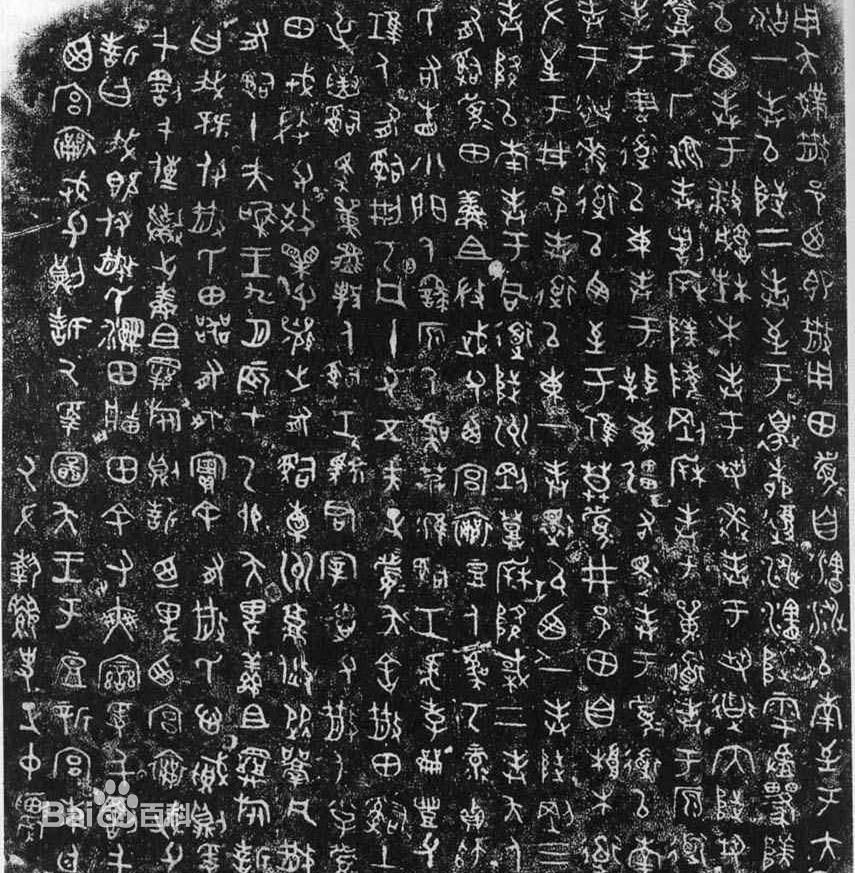
- If you read some of the "modern" books
published in Hong Kong, you will find nobody can understand the contents
except for Hongkongers. The language is in total chaos, like the uniquely
lazy slurring in the speech of Hongkongers. Sometimes even I as a homegrown
Hongkonger have no idea as to what
they are saying.
- Oh wait, isn't that the criticism aimed at the simplified Chinese
character system -- that it is completely divorced from what the mainstream
Chinese around the world are using?
- At my company, I get to meet many mainland
colleagues coming down to visit.
When they get here, the first thing that they ask about is: "Where is the
closest bookstore?"
I am embarrassed to have to say that we don't have many bookstores around
here except for chain stores such as Eslite, PageOne, Commercial Press,
Joint United, etc.
I asked them what kind of books they want. Typically they want books that are
not available on the mainland.
I ask: "What if they get confiscated when you go back?"
They said: "So what? I only lose the books. I'm not going to die because of it. Haha.
I'll be coming back and trying again next time."
What I want to
say is that mainlanders are perfectly aware of what is happening in the
world and they are not as ignorant and naive as many Hongkongers assume.
Conversely, many Hongkongers are completely ignorant of what is happening on
the other side of the border.
- The worst news is that Liu Zihao is an elite
student from the mainland, so that his command of the English language will
be even better than most Hongkongers.
- For example, how many Hongkongers know what
"+10086" is? If you've lived on the mainland, you have to know what it is.
- "I am just a student. I am exercising my
freedom of speech in a place where there is freedom of speech. I don't
represent anyone. I am just expressing my own views." I can really buy that!
Nowadays, it seems that any Joe who comes along will claim that he
represents the people of Hong Kong when he speaks. I know that I'll switch
off immediately, but still it is just fucking annoying. So it is good to see
someone who doesn't pretend to present 7 million Hongkongers or 1.4 billion
mainlanders.
- To the Hong Kong localists,
the use of traditional Chinese characters is the totem pole of Hong Kong
superiority over mainland China.
To most people in Taiwan, Hongkongers are merely mainlanders who can read the
traditional Chinese characters but still speak atrocious Mandarin.
To Americans and Europeans, the mainlanders, Hongkongers and Taiwanese are
just fucking Chinks.
-
Here is how to write incoherent Hong Kong style in traditional Chinese
characters which the Taiwanese won't understand.
屌!起條大陸學生底,網上公審佢,公到佢上報,出街比人指指點點,係人地地方讀書仲寸寸貢,要佢留唔到係香港留唔低,要佢出名,要攪到佢留唔到係香港讀書
(translation) Fuck! Let's ferret out the
background information on this mainlander student. We'll hold a public trial
on the Internet. We'll go public until he is reported in the newspapers.
When he goes out in the street, people will point at him. He is studying at someone else's
place and he is so arrogant. We'll make sure that he can't stay in Hong Kong.
We'll make him famous, we'll make sure he can't stay to study in Hong Kong.
However, the Taiwanese should be
able to appreciate the contents of that statement.
Q1. Are you satisfied with the
overall arrangements in the District Council elections?
53%: Satisfied
31%: So-so
10%: Dissatisfied
6%: No opinion
Q2. Do you
think that the atmosphere around these District Council elections was
enthusiastic?
40%: Enthusiastic
46%: So-so
10%: Unenthusiastic
3%: No opinion
Q3. Did you
vote in the District Council elections?
79%: Yes
21%: No
Q4. What is the
main reason why you went to vote? (Base: Those who voted)
33%: To express opposition to a particular candidate/political party/group
27%: To express support for a particular candidate/political party/group
3%: By habit
34%: Fulfill civic duty
2%: Other
2%: No opinion
Q5. What is
the main why you did not vote? (Base: Those who did not vote)
7%: Not sure about the choices of candidates/political parties
7%: Don't like politics
6%: Disapprove the political affiliations of the candidates
10%: Not time to vote
12%: No preferred candidate
12%: Voting isn't going to change anything
0%: District Council elections are unimportant
42%: Other
4%: No opinion
Q6.
When did you make your final decision?
23%: On voting day
22%: Within the last week
11%: Within the last two weeks
39%: Before the last two weeks
7%: No opinion
Q7. Who did
you vote for this time?
29%: A pan-democratic candidate
26%: A pro-establishment candidate
25%: An independent candidate
20%: Don't know/no opinon
Q8. What is your political stance?
33%: Pro-establishment
33%: Pro-democracy
24%: Neither
11%: No opinion
(Hong
Kong University Public Opinion Programme) ChungÆs Blunt Words: Campus
Mutation. By Robert Chung.
In just three months, there occurred inside
and outside the campus of Hong Kong University a referendum run by the
StudentsÆ Union, a staff plus student voting, and two Extraordinary General
Meetings held by the HKU Convocation. The campus has suddenly turned
ôdemocraticö.
In my humble view, student movements in
Hong Kong which started in the 70s have already declined in the 80s. What
happened in 1989 was an accident, driven entirely by external events
occurring in Beijing. By the 90s, studentsÆ voice had almost vanished. The
Polling Incident which happened in 2000 simply looked like a family event in
HKU. Since the 70s, I have worked and lived in the campus. What I see is
constant campus urbanization and lifestyle secularization. Few talk about
ideals these days.
From a developmental perspective,
university studentsÆ turning from elites to become ordinary beings might
well be inevitable. In advanced democratic societies, the burden of social
change might well rest on the shoulders of political parties or groups.
However, when Hong Kong is yet to become affluent, and the motherland yet to
overcome its problems, there is no reason why people in universities which
breed intellectuals should enjoy a happy life before everybody does.
All along I have been saying, those with a
doctorate degree may not be real intellectuals, while many of those without
are often knowledgeable people with great visions and moral standards much
much higher than many holders of ôshort cut doctoratesö and ôhonourary
degreesö. They are the true intellectuals.
The Umbrella Movement last year has
awakened many university teachers and students. Whether they supported,
opposed, or stayed neutral to the movement, they have thought it through,
and lived it through. Unfortunately, after the movement, those in power have
not taken heed of these intellectualsÆ contemplation, but rather engaged
themselves in helping some stealthy plans of retaliation.
The beauty of university lies in its
openness and accommodation. The value of academic freedom and university
autonomy lies in its respect for different opinions and non-restriction of
ideas. Provided that the ideas are put rationally and gracefully, anything
can be said and debated. Unfortunately, this ethics of complete openness is
now gradually eroded by the practices of classified documents,
confidentiality agreements, private dialogues, and so on. This is mutation,
top down.
The system has toppled. Those in power have
used every bit of power they have. This corrodes the good tradition of
universities. Teachers now march in silence, students challenge authority.
Between eggs and the hard wall, kind people would of course sympathize the
weak. However, I still consider it important for intellectuals to maintain a
polite and civilized mentality, even when facing bullies and hypocrites, in
order to convince people with reasons and self demonstration.
If we can change the rotting system, that
would be wonderful. If not, we should at least attempt to develop some
better alternatives, like civil referendums. Provided that our campus
mutation is not yet terminal, we may not need to sacrifice ourselves with a
bang.
Internet comments:
- Does Robert Chung have any credibility?
(The
Standard) October 29, 2015.
Occupy Central
co-organizer and University of Hong Kong associate law professor Benny Tai
acted as middleman for an anonymous donation of HK$800,000 to the
university's Public Opinion Program, leaked documents claim.
The documents, released to the media
yesterday with the title "Secrets involving the Occupy Central
organizers," show the university itself also received two other donations
in May last year from the same donor for HK$200,000 and HK$300,000.
The HK$800,000 donation was handed over
in what is believed to be part of an Occupy Central commission for POP to
conduct a "civil referendum" from June 20 to 29 this year on the issue of
constitutional reform, which saw nearly 800,000 people take part.
The documents revealed a total of HK$1.45
million was donated to the university's departments. POP, headed by Robert
Chung Ting-yiu, received HK$800,000 on or about May 20 last year. Its
purpose was set out as "civil referendum project," and the donor was
"anonymous." A month earlier, Tai had e-mailed Chung telling him POP would
receive HK$800,000 to carry out the referendum. The HK$300,000 check was
handled by dean of law Johannes Chan Man-mun. A third donation of
HK$200,000 was given to the faculty of arts on May 14.
The donations raised red flags at the
university's Development and Alumni Affairs Office, with recording
secretary Hydi Wong e-mailing Chung that same month to say it was
"improper for the university to receive any donation from an unknown
source" and wanting his help to find out the name of the donor." Chung
then contacted Tai, who agreed to having his name revealed.
Chung replied to Wong saying: "As far as
I know, Professor Tai himself received this donation from an intermediate
person who had clearly spelled out to him the purpose of the donation. I
myself know nothing about that person and I do not need to know. This has
been our practice since February 2012 when we kicked off our Civil
Referendum Donation Scheme." Tai, too, wrote to Wong: "I am sorry I do not
know the identity of the donor as the money is given to me from an
indirect source."
A university official condemned the leak
of confidential e-mails and said the institution has established
principles and procedures to verify the source of donations.
Occupy Central released a statement last
night, which said it was one of its co-organizers, Chu Yiu-ming, who
received the donation last year. "In 2013, a member of the public gave a
donation to the Reverend Chu Yiu-ming in support of his efforts in
promoting democracy in Hong Kong. Subsequently, Reverend Chu decided the
donation should be spent as follows: HK$800,000 should go to HKU's polling
program, specifically the civil referendum of June 22, 2014, HK$300,000 to
HKU's faculty of law for the holding of academic seminars, and HK$200,000
to the faculty of arts for personnel expenses involved in the Deliberation
Days, the Civil Referendum and related research. "All three donations were
made under the name of "Anonymous,"' the statement read.
To think that Robert Chung has the gall to
write: "Unfortunately, this ethics of complete openness is now gradually
eroded by the practices of classified documents, confidentiality agreements,
private dialogues, and so on." As long as the matter was discussed and
concluded successfully among Robert Chung, Benny Tai, Chu Yiu-ming, Johannes
Chan and Hydi Wong, the rest of the world can go fuck themselves! This is
Robert Chung's new ethics of complete openness.
- Robert Chung is nicknamed "Black Gold
Chung 黑金鐘"
on the Internet.

- Robert Chung is the director of the Hong
Kong University Public Opinion Programme. You expect him to make some expert
technical comments on the referenda that he quotes, but he has nothing to
say. So let me help you with the specifics:
September 1, 2015: Hong Kong University
Convocation Extraordinary General Meeting #1 (#314):
9,298 voted out of about 162,000 alumni for a 5.7% participation rate
October 29, 2015: Hong Kong University
Students Union (#360): 5,363
voted out of 16,137 for a 33.2% participation rate.
November 14, 2015: Hong Kong University
Staff Association/Hong Kong University Students' Union (#373):
482 out of 10,965 staff members voted for a 4.4% participation rate, and
754 out of 10,746 postgraduate students voted for a 7.0% participation
rate.
November 28, 2015: Hong Kong University
Convocation Extraordinary General Meeting #2 (#388):
4,454 out of 165,450 alumni voted for a 2.7% participation rate.
Question: Do these participation rates
indicate a high level of support for whatever the issues are? You need very
thick skin to say YES. You need slightly less thick skin to pretend
that you didn't notice.
- LOL when I read Chung writing: "I still
consider it important for intellectuals to maintain a polite and civilized
mentality, even when facing bullies and hypocrites, in order to convince
people with reasons and self demonstration." And also: "The value of
academic freedom and university autonomy lies in its respect for different
opinions and non-restriction of ideas. Provided that the ideas are put
rationally and gracefully, anything can be said and debated."
Here is the video of
the
bully/hypocrite Arthur Li Kwok-cheung failing to maintain a polite
and civilized mentality.
Here is the video of
the
bully/hypocrite Ayesha Macpherson failing to respect some
rationally and gracefully put ideas.
Here is the slow motion video of
the bully/hypocrite Lo Chung-mau failing to convince people by
means of reasons and self-demonstration.
Robert Chung may have been traveling abroad
at the time because all of Hong Kong saw these videos of the
bullies/hypocrites Arthur Li, Lo Chung-mau and Ayesha Macpherson trying to
destroy Hong Kong University. These counter-revolutionaries must pay for
their crimes against the People!
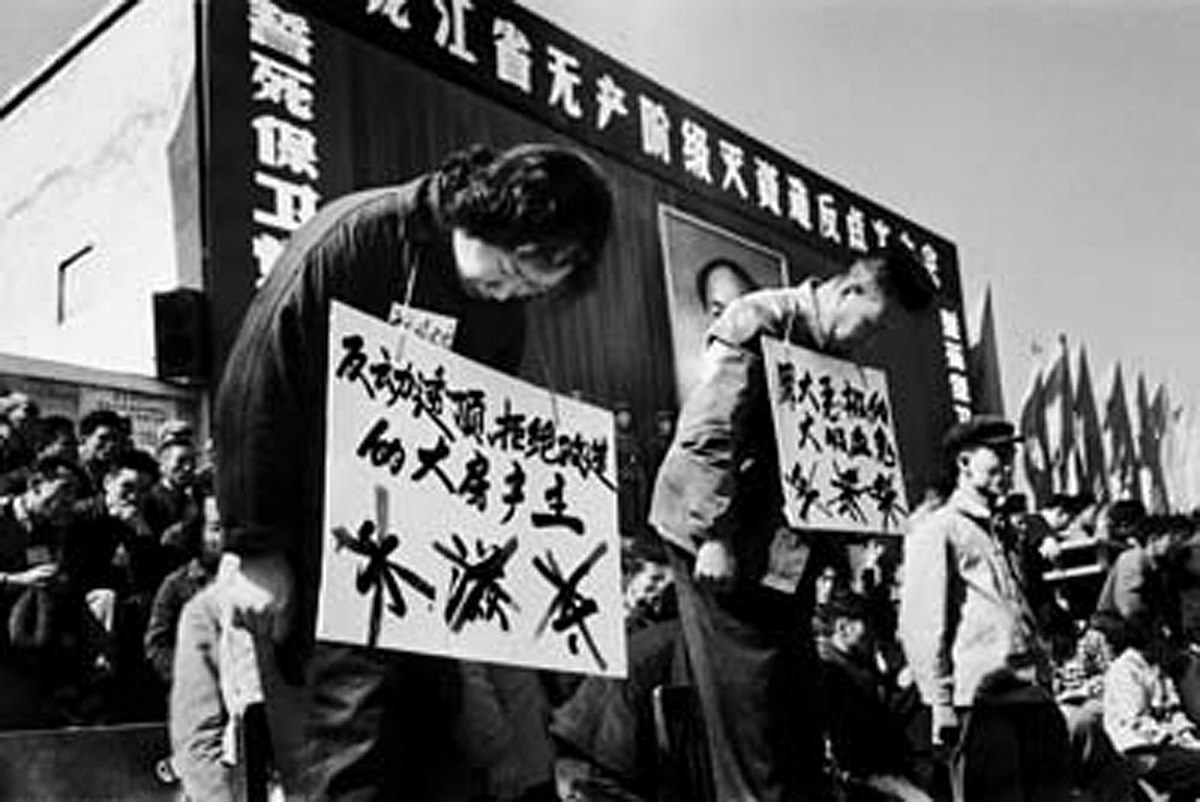
(Hong
Kong Free Press) December 3, 2015.
The system of judicial review is being
abused in Hong Kong, former Bar Association chair and retired Court of Final
Appeal judge Henry Litton said at the Foreign CorrespondentsÆ Club on
Wednesday. ôJudicial review is not available for challenges to government
policy,ö Litton said: ôThat is a fundamental rule in the separation of
powers. The court is concerned with law, not policyà [it] is the place for
the vindication of legal rights [and] redress for wrongs done. It is not a
debating hall or a classroom.ö
Discussing the judicial review cases on the
selection of Hong KongÆs chief executive, Litton said that acts of
reporting, consulting and putting forward proposals ôcould not by any
stretch of imagination be categorised as unlawful, abuse of power or
anything else that could remotely have brought these acts within the
purview of judicial review.ö However, the judge responsible for the
review did not dismiss the application and went forward with proceedings,
which Litton implied had been a waste of court resources.
Speaking on the judicial review of the
governmentÆs reform report, brought against the chief executive and the
government of the HKSAR, Litton said that ôthe notion that the entire
government of the HKSAR should be subject to review is totally absurd and is
symptomatic of how far the system has been abused in recent times.ö On
similar grounds, Litton also criticised the case lodged by Yvonne Leung Lai-kwok
concerning the second round of public consultation on political reform, and
the bringing in of the Chief Executive in that case. Citing the Hong Kong-Zhuhai-Macau
Bridge and its environmental impact assessment, Litton stated that judicial
reviews could be highly costly for Hong Kong. As a result of the judicial
review, he said, the project was delayed by two years and the cost incurred
rose to US$1 billion.
Yvonne Leung responded to LittonÆs remarks
by saying that she had never planned to ôput judicial review onto her CVö,
and that she did not take pride in suing Chief Executive Leung Chun-ying,
Apple Daily reported. ôIf the court could not respond to the public and make
a ruling as to unconstitutional policies through judicial review,ö Leung
said, ôthen there would be no procedure for redress if the chief executive
made policy errors.ö
Senior Counsel Alan Leong Kah-kit
responded saying that judicial review is an important component of the
separation of powers. If there were no judicial review, he said,
administrative bodies would not have to be worried about being challenged and
could act as they wish û and when that happens, the cost borne by the society
might be even higher than that of dealing with judicial review. Leong said
that he was surprised by LittonÆs comments because although the number of
judicial review cases has been on the rise since Hong KongÆs handover, the
court has the right to throw out cases which do not satisfy the arguability
test. There have been many unsuccessful cases of judicial review, Leong added,
and this shows that the court has fulfilled its role as gatekeeper.
The Chief Executive himself has long been
an outspoken critic of the judicial review process. In November, Leung said
that plans to build apartment units had been hindered because of judicial
review, which he has also routinely blamed for delays in infrastructure
construction projects.
(SCMP)
December 3, 2015.
A distinguished former top judge has
launched a stinging attack on Hong KongÆs legal system, lashing out at how
judicial reviews were being ômisusedö and some judgments ôso obscureö that
no one could understand them. In a doom-laden critique of a system ôdrowning
in irrelevanceö, former Court of Final Appeal judge Henry Litton said Hong
Kong must put in place a ôrobustö and ôrigorousö legal system relevant to
ordinary people.
Litton û who retired in July û said a
hidebound judicial system was losing its grasp on reality and courts should
not be a ôdebating chamberö to challenge government policy. Speaking at the
Foreign CorrespondentsÆ Club on Wednesday, he said: ôThe legal system, in
many instances, is wrapped in obscurity, cloaked in mumbo-jumbo, suffocating
under citations, and drowning in irrelevance. The harsh question must be
asked: is the Hong Kong judiciary sleepwalking towards 2047, wandering in a
dream world of its own, a world of authorities, legal texts, customs, black
letter law as if those were the entire substance and reality that exists? Is
it detached from a world of people whose only language is Chinese?ö
Litton, who retired in July, added that the
Civil Justice Reform introduced in 2009 to improve efficiency in the legal
system and reduce unnecessary litigations was ineffective. ôNothing much has
changed from those reforms,ö said Litton. ôIÆm pessimistic. Bad habits die
hard.ö
Citing a failed legal challenge to the
government over its political reform package earlier this year by University
of Hong Kong student union leader Yvonne Leung Lai-kwok, Litton hit out at
what he called the ômisuseö of judicial reviews. ôJudicial review is not
available for challenges to government policy. ThatÆs a fundamental rule in
the separation of powers. The court is concerned with law, not policy, for
obvious reasons. The courtroom is the place for the vindication of legal
rights, redress for wrongs done.
ôItÆs not a debating hall or a classroom.
ItÆs only when the public authority has acted unlawfully or gone outside its
lawful powers or abuses its powers given by a statute that a court can
intervene,ö he said.
Litton cited the delay and cost overruns of
the Hong Kong-Zhuhai-Macau Bridge caused by a court case brought on by a
Tung Chung resident in 2010 against the director of environmental
protection. ôAs an example of how the process of judicial review can be
costly to the community, take Hong Kong-Zhuhai-Macau bridge case. The judge
of first instance has got it all wrong, he had made a mistake. By then, it
was far too late to address the consequences of the mistake.ö Litton said
the judgments in the bridge case, which were over 100 paragraphs long, were
ôso obscure that no one could understand themö.
A third misused judicial review Litton
cited was one sought by Television Broadcasts Limited aiming to prohibit the
Communication Authority and the Chief Executive in Council from granting
three free-to-air broadcasting licences. High Court Justice Mr Thomas Au
Hing-cheung handed down a 13-page ruling in May 2013 to explain why he
refused the judicial review.
Hong Kong-born Litton was appointed a
QueenÆs Counsel in 1970 and joined the judiciary in 1992. He served as a
permanent judge of the Court of Final Appeal from 1997 to 2000 before
becoming a non-permanent judge of the Court of Final Appeal.
(SCMP)
Time for pan-democrats to set an example on rule of law in Hong Kong. By Alex
Lo. September 4, 2015.
Pan-democrats love to bang on about the
rule of law. But few local politicians are keener to abuse legal processes
to delay, obstruct and discredit the government.
Among the tactics is the abusive use of
judicial reviews by activists, filibustering by radical lawmakers and
deliberate reporting to the ICAC just so that they can claim someone they
have targeted is being probed for corruption. And if that someone turns out
to be completely innocent like Franklin Lam Fan-keung, the former Executive
Council member, well, who cares?
There is perhaps no greater champion of the
rule of law than former Court of Final Appeal judge Henry Litton. In a
public speech this week, he singled out the pernicious use of judicial
reviews for political purposes. In particular, Litton cited a failed legal
challenge to the government over its democratic reform package this year by
University of Hong Kong student union leader Yvonne Leung Lai-kwok. He
described that as a "misuse" of judicial reviews.
"Judicial review is not available for
challenges to government policy," he said. "That's a fundamental rule in the
separation of powers. The court is concerned with law, not policy. The
courtroom is the place for the vindication of legal rights, redress for
wrongs done. It's not a debating hall or a classroom."
There are no wiser words. But will those
student leaders listen? I doubt it. The same young people who idealise the
separation of powers seem to be rather ignorant of its real meaning.
Litton also cited a court case brought by a
Tung Chung resident against the director of environmental protection in 2010
in a bid to delay the construction of the Hong Kong-Zhuhai-Macau bridge. It
was widely reported that the resident was an elderly recipient of social
welfare who was used as a front by the Civic Party, a group full of
barristers, to launch the judicial review against the bridge project.
Politicians should at least have the guts
to do their own dirty work instead of exploiting ignorant elderly people.
The bridge project would have probably
suffered serious delays even without the judicial review. But it certainly
didn't help. If you want people to respect the rule of law, you should set
an example first.
(SCMP)
February 6, 2016.
Judges bypassed a ôfirewallö in recent
judicial review application approvals, leading to a tendency to abuse,
former Bar Association chair and retired Court of Final Appeal judge Henry
Litton told the journal Hong Kong Lawyer. The firewall refers to the step by
which the judge must be convinced that the applicantÆs case is reasonably
arguable, said Litton.
Litton believes that cases such as Yvonne
Leung Lai-kwokÆs should not have been considered for judicial review
but ôthe procedure adopted by the judge by-passed the æfirewall.'ö
Yvonne Leung filed for a judicial review
regarding the second public consultation process regarding Hong KongÆs
political reform. Cases like this ôgave oxygen to frivolous and vexatious
applications that should have been screened out,ö Litton said. Yet LeungÆs
case was rejected by the High Court in June last year, according to court
records.
According to Ming Pao, former lawmaker
Margaret Ng said this rejection shows that the firewall still stands and is
very high. Litton said that he had no problem with the idea that ôthere is
nothing wrong with the threshold for judicial review.ö He is dissatisfied
with the handling of recent cases.
Videos:
(The
Foreign Correspondents' Club) Henry Litton: Hong Kong's independent
judicial system - what does the future hold?
(FCC
HK @ YouTube) Henry Litton: Hong Kong's independent judicial system
- what does the future hold?
Internet comments:
- When you think 'judicial review',
these are the people that usually come to mind:
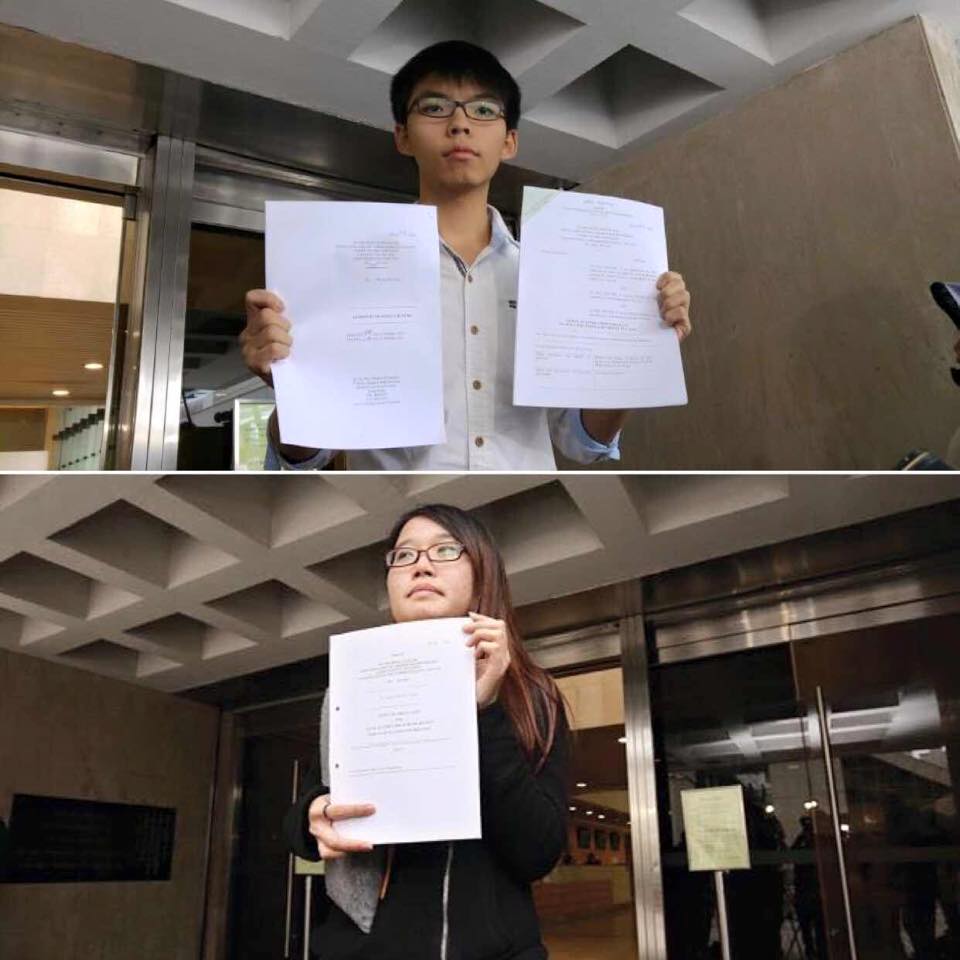
Joshua
Wong filed a judicial writ because he wants to become a Legislative
Councilor and earn $93,000 per month. Yvonne Leung filed a judicial writ
because she wants to put down on her resumÚ that she once sued the Chief
Executive. But the King of Judicial Reviews is Cheung Chau resident Kwok
Cheuk-kin.
(The
Sun) November 21, 2013.
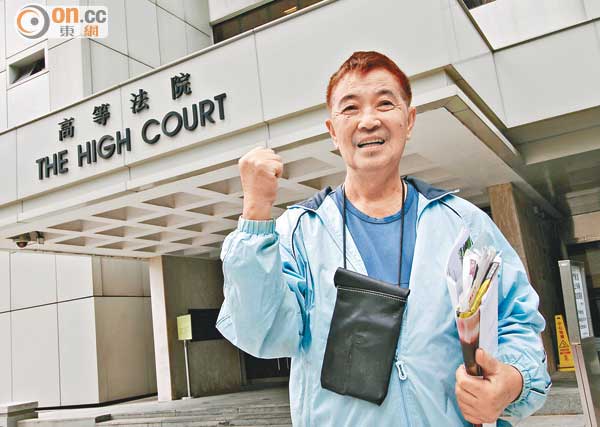
Over the past seven years,
70-something-year-old Kwok Cheuk-kin has sued the government at least nine
times. He has never won a single case, but in two cases he reached an
out-of-court settlement with the government.
In 2006, the Department of Transportation
approved a price rise for three routes of the New World First Ferry
Services. He applied for a judicial review on the grounds that the
Central-Cheung Chau route has always been profitable and so a price rise
is not justified. The government settled the suit by promising to
calculate prices separately by route in the future. Of course, any
economist will tell you that the net effect is that certain lightly
traveled routes will see huge price rises, which will discourage
unessential usage and eventually cause the routes to be shut down.
In another case, Kwok sued the government
over rural election methods in Cheung Chau. The government settled by
agreeing to bring the matter to the Legislative Council, which did
absolutely nothing to change things.
When Kwok Cheuk-kin graduated from
secondary in Hong Kong, he went over to study law in Taiwan. "I never
wanted to become a lawyer. But my grades were bad, so I applied for a
major that was easy to get into." When he returned to Hong Kong, he became
a low-level government clerk. In 1071, he joined the Defend the Diaoyutai
Islets demonstrations, got busted in the head by the police and sentenced
to 3 months in jail for participating in an unlawful gathering. With a
prison record, he never got promoted in his government career.
(Oriental
Daily) July 23, 2015.
Recently, lead-in-water is a hot topic.
So the King of Judicial Reviews Kwok Cheuk-kin has sued the Transport and
Housing Bureau chief Cheung Bing-leung and Water Supplies Department chief
Lam Tin-sing to demand the government supervise the installation of all
water pipes in accordance with the law. Kwok did not have a lawyer. He
listed his demands but offered no reasons to back his application for the
judicial writ.
(Hong
Kong Free Press) December 29, 2015.
Cheung Chau resident Kwok Cheuk-kin has
filed for judicial review with the High Court, seeking to abolish the
small house policy rights of indigenous residents of the New Territories.
Kwok, who has been dubbed ôthe king of
judicial reviewö, is challenging the Home Affairs Bureau and the Lands
Department in his action, Stand News reported. However, the writ did not
reveal further details about the application.
Under the Small House Policy, male
indigenous villagers who are descendants of a male line from a recognised
village in the New Territories may apply to build a small house, once in
their lifetimes, on their own land at zero premium, or on public land
through a private treaty grant.
In December, 11 indigenous villagers from
Sha Tin were found guilty of illegally transferring their land rights to
developers. A couple of days later, the High Court rejected a claim
brought by five Sheung Shui indigenous villagers against a law firm
representing a developer in a land dispute, ruling that the villagers were
just as guilty as the developer.
Previously, Kwok has lodged judicial
review challenges against the replacement arrangements for vacancies in
the Legislative Council and the August 31 decision of the Standing
Committee of the National PeopleÆs Congress on electoral reform, as well
as seeking a ruling that the Constitutional and Mainland Affairs Bureau
had failed to hold Chief Executive Leung Chun-ying accountable for not
disclosing a conflict of interest in Australian company UGL.
In a separate action, a student also
applied on Tuesday for judicial review to challenge the revised financial
arrangements for the city airportÆs three-runway system. The student is
protesting the decision to amend the charging structure for the airport
passenger fee from the original across-the-board level of HK$180 to
differing fees based on the service class and length of flight. The
amendment was announced on September 29, meaning the three-month time
limit for applying for judicial review expires on Tuesday.
Earlier this month, former Bar
Association chair and retired Court of Final Appeal judge Henry Litton
said that the system of judicial review is being abused in Hong Kong.
ôJudicial review is not available for challenges to government policy,ö
Litton had said. ôThat is a fundamental rule in the separation of powers.ö
However, other prominent legal figures in Hong Kong disagreed with his
view that the system is being abused.
(Ta
Kung Pao) (Ta
Kung Pao) December 7, 2016.
Over more than one decade, Kwok Cheuk-kin
has applied for at least 26 judicial reviews using legal aid. He lost
almost 90% of those cases, wasting public money in the process.
We interviewed Kwok at the office of the
Miami Resort Owners Association. This is an illegal structure next to the
4-th floor home of Kwok. Kwok's building also had an illegal structure
intruding into the fire passageway between two buildings. Based upon
aerial photographs, the illegal structure has been in existence since
December 2009.
According to government records, the
Buildings Department sent a letter on December 23, 2010 to the owner as
well as the Miami Resort Owners Association to dismantle the illegal
structure within 30 days. Six years later, the illegal structure is still
there.
Kwok told our reporter that his judicial
reviews did not involve any personal interests. He said that he paid for
the lead-in-water judicial review himself. "I lived in one Miami Resort
unit, and I own two other units that I rent out. To pay for the $500,000
legal fee, I had to sell one of them." Our reporter wondered if $500,000
is too low for an apartment. Kwok said that Miami Resort units are very
cheap. He said that he owns all of Building 4F. He lives on the ground
floor. The first and second floors are vacant because he can't afford to
renovate. Our reporter checked the records and discovered that none of the
owners of the three floors of Building 4F are Kwok Cheuk-kin.
Specifically, the ground floor was purchased by Ms. Leung Chui-wah in 1997
for $480,000 and held ever since.
Our reporter also found out that in
February 2003, the court pronounced Kwok Cheuk-kin bankrupt upon
application by a creditor. The order stayed until February 2007. Our
reporter questioned Kwok about his ownership of Miami Resort apartment
units. At first, Kwok was evasive. Eventually he said that he went into
business after retirement, lost money and declared bankruptcy. Our
reporter said that the ground floor of Building 4F is owned by Ms. Leung
Chui-wah. Kwok admitted that he is renting that unit. He also admitted
that he does not own anyting in Miaim Resort. As for the illegal office
space, he said that it was part of the garden and therefore not illegal.
When our reporter pointed out that the Buildings Department had issued an
order to dismantle, Kwok said that he does not know details because he is
only a renter. However, the order was issued to both the owner as well as
the Miami Resort Owners Association. As association chairman, Kwok really
does not have an excuse.
(Ta
Kung Pao) December 15, 2016.
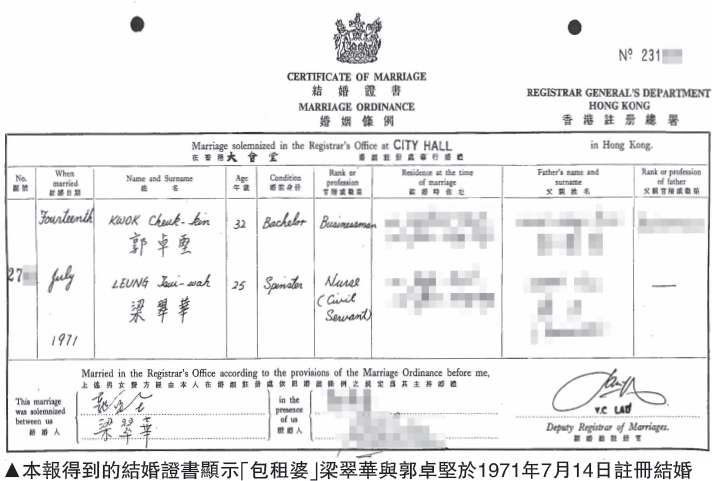
Our newspaper has obtained a copy of the
Certificate of Marriage dated July 14, 1971 between Kwok Cheuk-bin and his
'landlord' Leung Tsui-wah. When Kwok applied to the Legal Aid Department,
he claimed 'zero assets.' According to the requirements, the assets of the
spouse should be counted as well. Leung Tsui-wah's real-estate properties
are worth about $10 million.
- (Hong
Kong Free Press) February 5, 2017.
Trying to hold the government to account
in court almost always guarantees a David and Goliath scenario: the
government has unlimited resources to fight legal battles, while civilians
seeking to rectify injustices face systemic obstacles at every step of the
judicial process.
But in Hong Kong, one man is unfazed by
the challenge. Cheung Chau resident Kwok Cheuk-kin û widely known as the
ôking of judicial reviewö û has taken the government to court more than 20
times over the past decade, though he has only won once.
The talkative 78-year-old may look like
an unassuming elderly retiree, but he is a familiar figure to those on the
judicial scene. When Kwok posed for pictures in front of the High Court
during our interview, several security guards gave him a nod and a smile.
Kwok holds a law degree from a Taiwanese
university. He said he worked at Hong KongÆs justice department for a few
years before he was jailed for participating in a Baodiao û or ôdefend the
Diaoyu Islandsö û campaign in the 1970s.
Then in 1989, Kwok was detained by the
Chinese authorities for a year after joining the Tiananmen protests. ôI
escaped by smuggling sleeping pills and putting them in the drinks of the
guards,ö he said, ôthen I ran away, but I didnÆt go south because of the
tight security measures.ö Instead, he smuggled himself to Russia and then
took a plane to Germany before flying back to Hong Kong.
Despite working as a clerk at law firms
for many years, Kwok only filed his first judicial review after his
retirement in 2006. It was over the increase of First Ferry fares. He said
he was inspired by lawmaker and social justice activist ôLong Hairö Leung
Kwok-hung, who often appears in court as an applicant or defendant,
sometimes without lawyers.
Kwok lost his first judicial review
challenge five years later. But the defeat did not stop him pursuing more
judicial reviews against the authorities over various issues, such as the
controversial Small House Policy and the HKTV free-to-air licence saga.
Though Kwok is hailed as a hero by some
in the pro-democracy camp, the court has criticised some of his
applications for being an ôabuse of processö or initiated ôwithout a clear
understandingö of the issues.
In recent months, Kwok made headlines by
filing a number of judicial review challenges against Chief Executive
Leung Chun-ying and pro-Beijing lawmakers over the legislatureÆs oath row.
When asked to comment on the controversy, the elderly man took out his
well-worn copy of the Basic Law while reciting the provisions in Hong
KongÆs mini-constitution that he argued Leung and other politicians have
violated.
ôIÆm not physically capable enough to
participate in protests and challenge the police cordons, so I can only
rely on judicial reviews,ö Kwok told HKFP.
Asked if he believes judicial review is
an effective means of seeking justice, Kwok said: ôIt is justice when you
win.ö
But Kwok, who has been fighting in the
courtroom for the last 10 years, thinks that his chances of winning are
not determined solely by the strength of his legal arguments, but there
are other decisive factors: judges and the legal aid system.
Judicial review is a formal mechanism for
keeping public bodies in check. It mainly reviews administrative decisions
they make, and looks at whether a law or administrative decision is
compatible with the Basic Law.
Critics û including incumbent leader
Leung Chun-ying and retired Court of Final Appeal judge Henry Litton û
argue that judicial reviews have been abused. Others accuse the Legal Aid
Department of giving out funding too easily.
During a rare opportunity to speak
publicly, Chief Justice Geoffrey Ma Tao-li defended the judicial review
system last year, saying that the resulting decisions serve as a guide to
good governance, even if they may occasionally cause inconvenience.
The High Court has consistently accepted
less than half of applications between 2011 and 2015. The number of
judicial review applications granted leave accounts for a tiny portion of
the judiciaryÆs caseload. For example, the Court of First Instance had
around 20,000 first instance civil litigation cases in 2015, whereas only
48 leave applications for judicial review were granted that year.
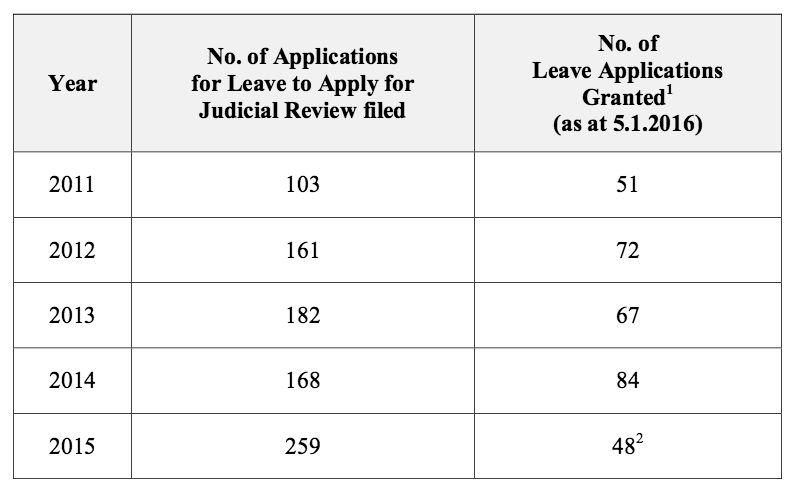
A frequently cited reason for not
granting leave is the lack of legal merit, but legal scholar Karen Kong
argues that the courts have generally been reluctant to deal with issues
intertwined with politics, due to the conservative attitude of some
judges.
This is a view shared by Kwok, though he
expressed the criticism more bluntly. ôJudges constantly move the
goalposts,ö he said.
ôSome judges make decisions based on what
they think the government prefers. In many judicial review cases, the
applicants should have won but the court found many reasons to justify
ruling in favour of the government.ö
Kwok gave the example of his judicial
review over the governmentÆs controversial decision in 2012 to bar
lawmakers from running in a by-election within six months after they
resigned from the legislature. He criticised the government for violating
the constitutional right to stand for election.
ôJudge Thomas Au of the Court of First
Instance, as well as the Court of Appeal, said it is a political issue
pertaining to the legislature and the court should not interfere,ö he
said. ôBut then, how come the two courts decided to interfere in the
[oath-taking saga] of Yau Wai-ching and Baggio Leung Chung-hang this time
around? Many people did not see this coming.ö
Generally, the courts respect the
decisions of the legislature based on the principle of separation of
powers. The court has also emphasised in previous judgments that it should
exercise its jurisdiction over the legislatureÆs affairs in a
ôrestrictiveö manner.
But last November, Judge Au of the Court
of First Instance and three Court of Appeal judges rejected the legal
argument made by counsel for Yau and Leung that the court should stay out
of the political dispute. They ousted the duo from the legislature for
staging a controversial protest during a swearing-in session.
The courtÆs decisions to intervene in the
oath dispute drew criticism from the public and the legal sector.
Barrister and ex-lawmaker Audrey Eu has suggested that the impact on the
cityÆs rule of law would have been less damaging had the court remitted
the decision to the legislatureÆs president for his reconsideration.
While some legal scholars believe
conservatism may explain why most judges tend to adopt a pro-establishment
position, Kwok has a different theory for it.
ôJudges in the lower courts could get
promoted to the Court of Final Appeal. Who doesnÆt want to climb the ranks
and become rich?ö he said. ôBut itÆs different at the Court of Final
Appeal, because the judges there are already at the top. So they may have
other motivations: to gain a reputation for being fair, so that they may
get the opportunities to sit on international hearings.ö
While KwokÆs opinion remains speculative,
he is not alone in thinking that the courts are biased: there has been an
increase in online comments sharing KwokÆs sentiment in recent years. With
Hong KongÆs justice system being dragged into political debates, legal
scholar Eric Cheung Tat-ming has warned that public perception of judicial
independence and fairness is an important indicator of the rule of law.
A factor that discourages people from
pursuing judicial reviews is the high litigation cost. While Hong Kong has
a legal aid system in place, critics argue that it is not enough to ensure
equal access to justice.
In 2013, former Bar Association chair
Kumar Ramanathan criticised the ôinstitutional inertiaö of the Hong Kong
government to widen the scope of cases where legal aid is made available.
ôWhere there is no legal protection, there is in effect no law. In so far
as Hong Kong citizens are precluded from access to the Courts, the rules
of the law which they would like to invoke are for them as good as
non-existent,ö he warned.
The success rate for legal aid
applications for judicial review cases remained at about 25 per cent
between 2011 and 2015. Applicants who press on without legal aid can be
ordered to pay the governmentÆs legal costs if they lose.
This was what happened to Kwok during the
2015 lead water scandal. While Kwok received legal aid for most of his
past judicial review cases, he was not given legal aid when the court went
ahead to review the governmentÆs handling of the water crisis. He lost and
û without legal aid û was ordered to pay the government over HK$500,000 in
costs. He said the government had not yet pursued him for the amount.
A limitation of the legal aid system,
Kwok claimed, is that lawyers assigned by the Legal Aid Department do not
put much effort in the cases and ôso if you win you are already very
lucky.ö
He also said that in his experience, the
legal aid system played a decisive role in his access to court.
The Legal Aid Department may seek advice
from independent lawyers on the merit of an application. Kwok found this
process arbitrary, partly because he believed the choice of lawyer
effectively decided whether he would be given legal aid.
ôIf they donÆt want to give you legal
aid, they can find a pro-establishment lawyerà It is always possible to
justify not giving out legal aid,ö he said. ôBut if they want you to go
ahead, they can find a pan-democrat [lawyer] such as Audrey Eu, who will
write something good about your case.ö
The Legal Aid Department told HKFP that
KwokÆs allegation was ôtotally unfounded.ö It said that it will consider
evidence and relevant legal principles in deciding whether an application
is meritorious. In the absence of precedent, it will select lawyers for
giving independent legal opinion according to a list of criteria,
including their level of experience and area of expertise.
ôPolitical inclination and ideology are
not among those criteria to be considered,ö the department said. It added
that if an applicant is denied legal aid, they can appeal against the
decision to the Registrar of the High Court.
KwokÆs activism has brought him unwanted
attention too. For the first time, Kwok was featured on the front page of
the Beijing-backed paper Ta Kung Pao last December. The paperÆs
investigative team claimed that Kwok had ôinterwoven relationshipsö with
the Democratic Party on the basis that he ôconstantly texted legal
questionsö to a lawyer employed by Albert Ho, lawyer and ex-chair of the
Democratic Party.
In another article, it accused Kwok of
responsibility for illegal structures at his residence in Cheung Chau,
though it only mentioned at the end of the story that Kwok was just a
tenant of the property.
Kwok also made enemies among Cheung Chau
leaders after he won a judicial review case in 2015 over unlicensed
funeral parlours on the island. He said the rural leaders still verbally
harass him to this day out of resentment that he shut down their business.
But he said he was not troubled by the
harassment. ôI just laugh at it,ö he said. ôAs for my neighbours, I am on
good terms with them because I help them with drafting letters to the
government. I have my own strengths.ö
Even though Kwok has received help from
pro-democracy lawyers, he said he prefers taking action alone over having
allies.
ôI donÆt want to be affiliated with any
group, because our ideologies may conflict. If I file a judicial review
challenge over an issue that affects the interests of a political party
IÆm associated with, thatÆd be tricky,ö he said.
Unmarried and single, Kwok said he has no
family burden and can therefore risk going bankrupt should he lose a
lawsuit. Asked if he has other hobbies besides his courtroom activism, the
elderly manÆs first reaction was: ôNo, I donÆt.ö
He then continued: ôI take care of my
pets û I have one dog and three cats. Sometimes I go fishing. I also grow
vegetables for my own use. ThatÆs all I do.ö
- (Oriental
Daily) May 10, 2017
Previously Kwok Cheuk-kin filed a
judicial review over Chief Executive CY Leung's omission of the word "Hong
Kong" in his oath of office. Kwok wanted the court to nullify the oath and
thus vacate the office of Chief Executive for the entire term.
The judge pointed out that CY Leung took
his oath of office in 2012, but Kwok Cheuk-kin applied for a judicial
review in November 2016, which is 4 years 4 months later. Since the
five-year term of CY Leung is due to expire, this whole case becomes an
academic exercise.
Kwok Cheuk-kin argued that he had no
basis to file until the National People's Congress Standing Committee
interpreted Article 104 of the Basic Law last year. The judge disagreed.
He said that the High Court had already determined what an oath must be
like in the 2004 case of legislator Leung Kwok-hung's oath of office.
Therefore Kwok did not have to wait until the interpretation to demand CY
Leung to re-take his oath. This was a misinterpretation of the law and not
a reason to cause the delay.
The judge ruled that the lack of a good
reason for the delay was sufficient to reject Kwok's application.
Furthermore, CY Leung only omitted "Hong Kong" in the last sentence of his
oath, possibly due to carelessness. Leung was not refusing or neglecting
to take the oath. Allowing the judicial review to proceed may create
uncertainty over everything that Chief Executive CY Leung has done in the
past or will do in the future. Therefore, the judicial review was
rejected.
As for legal fees, the judge believed
that it was reasonable for CY Leung to hire a Senior Counsel to handle the
case and therefore Kwok Cheuk-kin will have to pay Leung's legal fees.
- (Apple
Daily) May 10, 2017. CY Leung hired Senior Counsel Benjamin Eu,
whose legal fee is estimated to be around $3 million. Kwok Cheuk-kin said
that he is ready to declare bankruptcy. He said, "It does not matter. I
own nothing! At least I did this for the public, not just for myself."
- If he declares bankruptcy, then the tab
gets picked up by the government using taxpayers' money. It does matter,
because Kwok Cheuk-kin is sticking the public with the bill!
And it does not mean that this will stop.
Your bankruptcy status means that you are automatically entitled to legal
aid the next time.
- (Hong
Kong Free Press) May 12, 2017.
A Cheung Chau resident may go
bankrupt after the High Court declined to hear his judicial review
challenge over the validity of the oath taken by Chief Executive Leung
Chun-ying.
Retired civil servant Kwok Cheuk-kin,
78, told HKFP that he expects to be asked for around HK$3 million in
legal costs. ôI am not worried about bankruptcy because I am alone and
have no burden,ö he said. ôIt wonÆt stop me challenging the government
in court in the future.ö
WednesdayÆs decision came after Kwok
took Leung to court last year following the governmentÆs unprecedented
move to challenge the oaths of two localist lawmakers and BeijingÆs
intervention in the legislatureÆs oath row.
After Leung and the Department of
Justice sought to unseat the lawmakers, footage resurfaced of Leung
omitting the phrase ôHong Kongö during his oath-taking for the
position of chief executive in 2012.
Kwok then asked the court to declare
that LeungÆs oath was inaccurate and that he should retake the pledge
of allegiance. He told HKFP earlier that he and his lawyers did not
ask for Leung to be disqualified because they believed it would be
unlikely that the court would oust the chief executive.
On Wednesday, Judge Thomas Au
Hing-cheung rejected KwokÆs request on the basis that his application
suffered from undue delay û four years and four months since Leung was
sworn in.
During the leave hearing, Kwok agreed
with the governmentÆs case that the omission by the chief executive
was unintentional, as opposed to a deliberate act of declining to take
the oath. He suggested that Leung retake the oath as a solution.
On this basis, the judge held that
the outcome would not differ whether or not he allowed the judicial
review case to proceed. He added that the case would have little
impact as Leung is set to leave office in June. The judge ordered Kwok
to pay the respondentÆs legal costs, including the fees of two
barristers acting for the government.
ôThe Hong Kong government acts like
the Singaporean one in trying to prevent people from pursuing judicial
reviews by imposing heavy financial consequences on them,ö he said.
ôBut I wonÆt be deterred.ö
ôSince young people donÆt come
forward to challenge the government in the courtroom, I will do it,ö
he added. ôI must seek to restore justice without abusing the court
process.ö
Kwok said he would appeal against the
decision, with which he was ôstrongly dissatisfied,ö on the basis that
Judge Au avoided adjudicating on whether Leung should rectify his
mistake even if it was unintentional. He said he had no plan to seek
public donations to help cover the costs.
Kwok told HKFP earlier that he had
only won once out of at least 20 judicial review cases he had filed
against the government in the past decade. He was able to avoid going
bankrupt by applying for legal aid for most of the applications. But
he did not ask for legal aid when seeking to challenge LeungÆs oath at
short notice.
Kwok earned the nickname of ôking of
judicial reviewö for his judicial activism, but critics have argued
that Kwok abused the judicial review system and wasted public money.
- (TVB)
June 8, 2017.
The Legal Aid Department notified
Kwok Cheuk-kin that he has been abusing the legal aid system over the
past three years. Specifically, the Legal Aid Department said that
Kwok had applied for legal aid a total of 21 times between July 2015
and April 2017, with 17 refusals. The Legal Aid Department holds that
Kwok has been abusing the system. Therefore they are invoking the
Legal Aid Ordinance and will deny him legal aid over the next three
years irrespective of his lack of financial means or the merits of the
case.
-
CAP 91 Legal Aid Ordinance Section 11 Revocation and discharge of
certificates:
The Director may, in such
circumstances and manner as may be prescribed, revoke or discharge any
legal aid certificate.
The Director is given a lot of leeway
to exercise discretion because there are too many situations to
enumerate a priori.
- How do you think Kwok Cheuk-kin
will react? With the assistance of former legislator councilor and
barrister Albert Ho (Democratic Party), Kwok is filing a judicial
review against the Legal Aid Department director for accusing Kwok of
abusing the legal aid system and denying him legal aid. Of course,
Kwok will be applying for legal aid for this judicial review too.
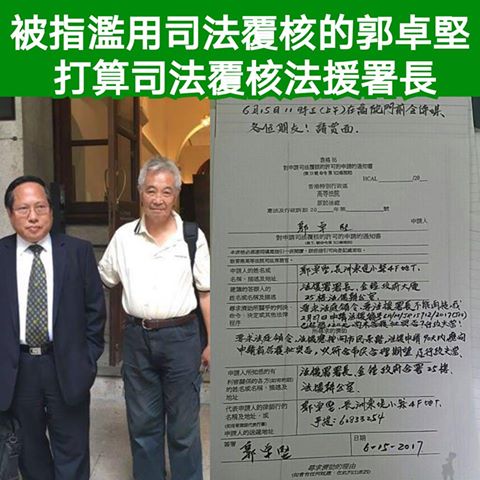
- (HKG
Pao) By Chris Wat Wing-yin.
In 2016, The Stand News interviewed
Kwok Cheuk-kin. You can read this as evidence of Kwok's mental state:
"During the June 4th 1989 incident, Kwok had a frightening experience.
He said that he went to Beijing to support the students. Several days
later, he was taken to Shanghai and held under house arrest for one
year. His family followed his instruction and offered sugared bird's
nest laced with sleeping medication to the public security officers
who were guarding him. When they fell asleep, Kwok escaped. He went to
Heilongjiang and got a local ID. He crossed the border to Vladistock,
flew to Moscow and then Berlin. He flew back to Hong Kong from
Berlin."
These "experiences" might have conned
a young reporter, but not veteran reporters like us who have covered
the June 4th incident. If a Hong Kong resident were held under house
arrest in Shanghai for one year, it would have been front page news in
Hong Kong. The Alliance to Support Patriotic Democratic Movements in
China spent so much money to support the democracy movement. Could
they forsake such a freedom-loving pro-democracy Hongkonger, so that
his family has to take such personal risks to allow him to drug the
police and escape to Russia? Is this story credible or risible?
Kwok Cheuk-kin also claimed to have
worked in a legal department of the Hong Kong government. He said: "In
the 1973 Diaoyutai movement, I was clubbed in the head by the police
and spent three months in jail."
Everybody who has lived through the
colonial era knows that the Hong Kong British administration does full
background checks on even clerks, much less for the legal department.
I have a friend who was a university
student union president. After he graduated, he wanted to join the
ICAC. He did not even get an application form. Another friend had a
mentally ill brother, and thus got rejected repeatedly by the
Disciplinary Services. So it is incredible that a person who went to
jail for Diaoyutai protests would be hired by the legal department in
the 1970's.
A few days ago, a couple committed
suicide in a Cheung Chau vacation villa. As the chairman of the Owners
Association of Bella Vista Villa, Kwok Cheuk-kin spoke out. Hey, the
chairman of a Owners Association must be an owner himself. So why can
a owner be applying for legal aid repeatedly? Anyone who lies too
often gets caught often.
I don't blame Kwok Cheuk-kin for
lying and abusing legal aid to play his games. I only blame the Legal
Department did not realize for eleven years that this guy is cuckoo.
Isn't that the worst possible case of dereliction of duty by public
servants?
- Eggs
and High Walls Even a jailbird who didn't like his prison food filed
a petition for judicial review with the High Court.
- Here is the most often cited case (Ta
Kung Pao):
As early as in the end of 2009, the Hong
Kong SAR government had already put on the agenda the building of Route
No. 10 linking Tuen Mun to Chek Lap Kok, together with the Hong Kong-Zhuhai-Macao
Bridge project. Out of the blue, however, there came out an Old Lady Chu,
a public housing resident in Tung Chung, who applied for a judicial review
against the project on reason that dusts generated during construction
were harmful to health. With the lawsuit dragging on month after month,
construction cost for the project sharply increased by $8.8 billion, and
commencement of construction was delayed for more than one year. As a
result, construction of the Tuen Mun-Chek Lap Kok link could start only
one year later. Completion of its construction, originally scheduled in
2017, now has to be postponed until 2018.
In the aftermath, that Old Lady Chu, made
a clean breast of it to the media. She's illiterate, basically knowing
nothing about the Hong Kong-Zhuhai-Macao Bridge. Neither did she want to
cause a waste of over $8 billion public funds. But a member of the
"barrister party" came to her and offered to file a lawsuit on her behalf
against the government. She only needed to act as a figurehead plaintiff
for the lawsuit, and then all legal actions would be taken care of by people from
the "barrister party".
It is only because of such a lawsuit that
the Chek Lap Kok airport had to become an "isolated island" following the
bridge collision accident last Friday. That accident affected some people's
livelihood and became an international laughing stock. The chief culprit
causing all these problems is none other than the Civic Party, that
"barrister party" which keeps paying lip service to public justice and people's
will.
(Cable News @YouTube)
https://www.youtube.com/watch?v=bVxRYHNV1VM Interview with Old
Lady Chu.
- (Apple
Daily) Senior counsel and Civic Party legislator Alan Leong said
that the government gets to have its way in the absence of judicial reviews.
In the long run, therefore, the social costs would be much higher.
Well, that's unprovable, unverifiable and untestable,
just like saying "If you don't elect Alan Leong as the next Chief Executive,
the social costs would be much higher."
- Social costs would be much higher? You
better hire an economist to do an estimate. On one hand, you have 10 large
projects and all 10 are delayed due to judicial reviews. On the other hand,
you have 10 large projects and the government screws up 2 of them while the
other 8 are completed on schedule without apparent problems. Which is
more costly?
- Of course, lawyers want many more
judicial reviews because it represents a permanent income stream to them
(billable at $100,000 per hour in court). Most of the petitioners are indigent and
therefore the bill is paid for by the Legal Aid Department which is funded
by the taxpayers. Super-rich
tycoons can pay their own bills. Only the middle-class can't afford to.
- The real reason why lawyers want judicial
reviews:-
Money, money, money
Must be funny
In the lawyer's world
Money, money, money
Always sunny
In the lawyer's world
- Yvonne Leung said that she was very
impressed by the idea of separation of the three powers (executive,
legislative and judicial). Well, that means that if you don't like the Chief
Executive, you use the other two powers (legislative and judicial) to
obstruct all executive actions. In the legislative council, it means
vetoing and filibustering all proposed legislative presented by the
executive branch. In the judiciary, it means filing judicial
reviews on executive actions.
- Of course, this is a game that two can play. Someday it may be that a
moderate pan-democrat will be elected as Chief Executive. Guess what? The
pro-establishment camp can do exactly the same and watch him/her whine about
obstructionism.
- In order to take de facto control
of a place, you have to control media, legislature, judiciary and education.
That's what all the fights are about.
- Nobody is talking about eliminating
judicial reviews. Judicial reviews can be used, but they should not be
abused. Henry Litton is saying that frivolous applications for judicial
reviews ought to be dismissed summarily, in a single paragraph instead of 88
paragraphs. For example, when Kwok Cheuk-kin sues the government over
lead-in-water supervision, he listed his demands but offered no reasons to
back his application. That should be dismissed summarily. As another
example, Kwok Cheuk-kin said that he heard about the
HKTV case. Although he has never
watched any of the programs, he said that it felt wrong to him and therefore
he filed a judicial review. If every citizen in Hong Kong files a judicial
writ with legal aid for everything that feels wrong to them, the entire
system would be clogged down and Hong Kong would be bankrupt. However, the
lawyers would become super-rich, and that is good for the
economy as the money trickles down from them.
- (Headline
Daily) By Chris Wat Wing-yin. April 27, 2017.
According to information, it is costs very
little to play the judicial review game. The initiation fee is $1,045. Once
you file, you will be on television news and newspaper front pages
repeatedly for 24 hours. This is a lot cheaper than buying an ad on TVB.
All you have to do is fill out a form and
make a sworn statement at the High Court on the first floor of the building.
Then you proceed to the second floor and pay $1,045 at the accounting
department. This fee includes one court session. The media will be notified
immediately. So this is an excellent and cheap method of promotion.
You won't need a lawyer until the second
court session. So you get your photos taken by the media first, and then you
will go to apply for legal aid. If approved, you can continue your quest
since this is using public funds. If not approved, you should back off and
stop your quest. At this time, the judicial review is a cheap method for
self-promotion while hurting other people.
Of course, a successful judicial review
requires the cooperation of the Legal Aid Department. It is easy as pie.
Although it is said that legal aid depends on the economic condition of the
applicant as well as the nature of the case, it seems that all political
cases over the past decade have been approved. The Legal Aid Department
simply turns a blind eye and approves almost 100% of the cases.
From the court to Legal Aid Department, the
money comes from the public funds. Apart from the applicant, the beneficiary
of judicial review is the lawyer overseeing the case. The Legal Aid
Department has a roster of lawyers for the applicant to choose from. The
Civic Party and Democratic party lawyers are popular choices. So we don't
have to spell out who is getting all the legal aid money for judicial
reviews.
In the case of the King of Judicial
Reviews, he has filed more than 30 applications using legal aid money. How
can the Legal Aid Department continue to approve money for such an
individual? It occurs to me that we little citizens should maybe apply for
legal aid for a judicial review against the Legal Aid Department's largesse?
- (Silentmajority.hk)
May 2, 2017.
A citizen only has to pay $1,045 to
initiate a judicial review. The second stop is at the Legal Aid Department.
According to information from the Legal Aid Department, each qualified
applicant has to pay one-fourth of the legal fees to a maximum of $72,595.
This means that if approved, each application will cost the Hong Kong
taxpayers $290,380.
According to information, Kwok Cheuk-kin
has filed 35 judicial reviews. If Legal Aid approved each case in full, then
the taxpayers has paid a total of 35 x $290,380 = $10,163,300 for these
judicial reviews.
Many of Kwok's judicial reviews are
repeated filings of the same case. For example, Kwok filed 7 judicial
reviews last year over the Legislative Council oaths of office, including
the failure of Legco president Andrew Leung to hire lawyers for the DQ4
legislators; the failure Chief Executive of CY Leung to respond to questions
from the DQ legislators; the cases of pro-establishment legislators as well
as Chief Executive CY Leung for omission of words.
As a Cheung Chau resident, Kwok has often
used the courts to review certain minor local issues, such as the higher
prices for the Cheung Chau ferry service on holidays and the establishment
of a funeral parlor in Cheung Chau.
- (Oriental
Daily) September 29, 2017.
Today a court rejected Kwok-Cheuk-kin's
application for a judicial review over the police assembly in February 2017.
Kwok had said that the assembly did not apply for police permission. The
judge ruled that the assembly took place on private premises and that Kwok
did not have sufficient personal interest in the case to be affected. The
judge ordered Kwok Cheuk-kin to pay for the legal fees for the police
commissioner.
- (Oriental
Daily) October 14, 2017.
When Kwok Cheuk-kin filed his judicial
review over the oaths of office for Yau Wai-ching and Leung Chung-hung, he
told everybody that he might become bankrupt but he "take responsibility for
whatever he does." After his application for legal aid was rejected, he
immediately ran a fund-raising campaign to pay for his legal bills.
Now Kwok Cheuk-kin has just announced that
he intends to move to the United Kingdom next year because there is nothing
left about undemocratic Hong Kong to stay for. But Internet users
immediately demanded to know what is going to happen to the money that he
has raised so far. Today Kwok declared that he will not publish any
information in case the government will take away his Old Age Living
Allowance.
In Hong Kong, senior citizens aged 70 or
over receive $1,290 without any asset/income limits. Therefore this is not
what 73-year-old Kwok Cheuk-kin is referring to. Instead, he is most likely
referring to the Old Age Living Allowance of $2,565 per person for which
there is an upper asset limit of $329,000. So did he raise more than that
figure?
(SCMP)
November 29, 2015.
The Territory-wide System Assessment exam was introduced in 2004 to assess
Primary Three, Primary Six and Form Three pupils' basic knowledge in
Chinese, English and mathematics. But the exams have been heavily criticised
for leading to drilling and excessive homework.
The Education Affairs Committee
of the Legislative Council held a marathon session to listen to public
opinions on the TSA. The main attraction were three children:
(Epoch
Times @ YouTube) Two Primary Three boys who oppose the TSA
(Epoch
Times @ YouTube) One Primary Four girl who supports the TSA. She came
with her father who is a pro-establishment DAB party member.
(Ming
Pao) Two Primary Three Boys who oppose the TSA
These videos are worth looking
at, not so much about the substance of the speeches but the way in which the
children were clearly given scripts to read aloud.
(Ming
Pao @ YouTube) The girl told the media that her father basically wrote
the script but she made some minor changes.
Internet comments:
- Of all people, League of
Social Democrats legislator Leung ("Long Hair") Kwok-hung came out to denounce
a man for mis-educating his daughter.
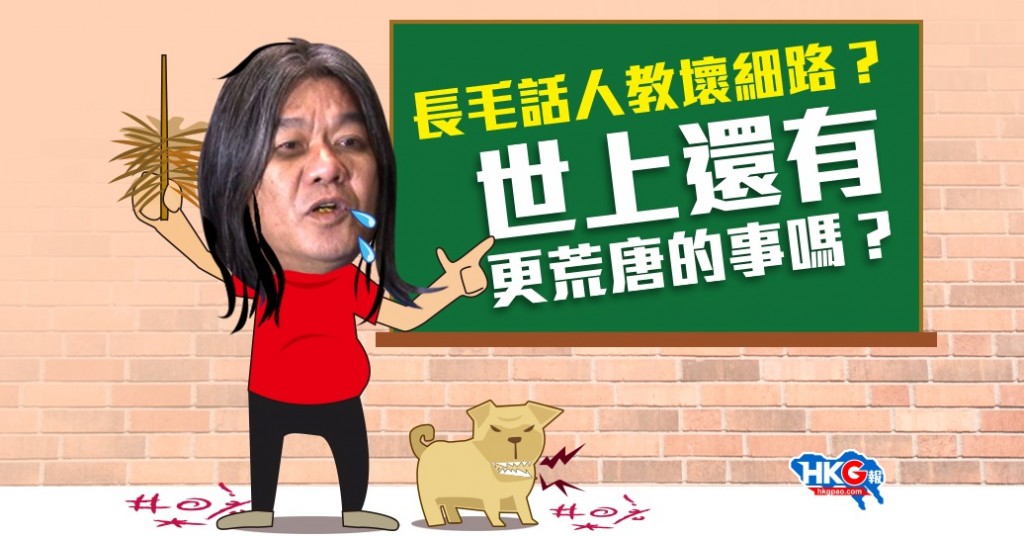
Leung never gave a rat's ass about throwing objects and using foul
language in the Legislative Council. How is that for setting a bad example to mis-educate children?
-
Danny Chan, the father of the Primary 4 girl, said that he wishes an
education issue should be discussed as education and not politics. That was
wishful thinking, as he is getting threatening/insulting phone calls now.
Chan describes this as the tragedy of Hong Kong. Chan said that he did not
tell the DAB that he was going to the Legislative Council, and the DAB had
no inkling as to what he might say. He said that he asked his daughter about TSA,
and she told him that the TSA gives her less pressure than the regular exams.
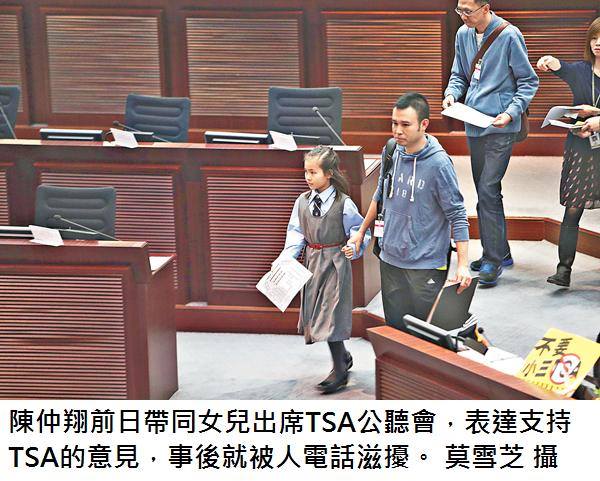
- (Wen
Wei Po) An independent anti-TSA district councilor Chan Kwok-keung
posted the mobile telephone number of DAB member Danny Chan on Facebook. The
information was relayed by other Internet users along with comments: "Let me
call Grandma Chan to see if she agrees to let her granddaughter be
brainwashed," "Please remember this number. We know what to do" and "I just
called. It was really him."
- (Apple
Daily) Danny Chan's daughter attends the Yaumati Catholic Primary
School. Today, the school issued a statement:
(1) the father and daughter are
expressing their personal opinions at the public hearing, which do not
necessarily represent the school;
(2) the school respects the freedom of speech for parents and students;
(3) the school takes the best interests of its students to heart, and wishes
that the student(s) will not be unnecessarily disturbed as a result of this
incident.
The school also disclosed that
they conducted a poll of parents and received 340 responses in which 52%
wanted the elimination of TSA while less than 20% want to maintain the status
quo.
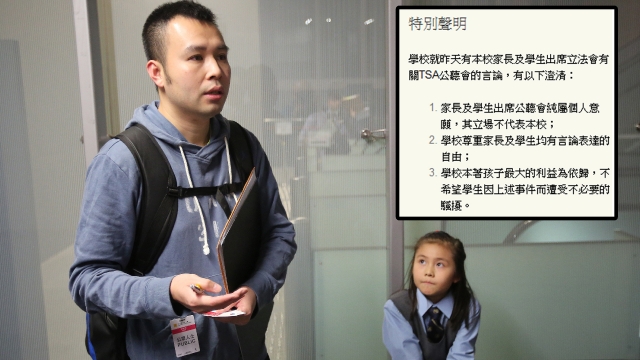
- Two members of Passion Times
also testified. So why were their political affiliations not an issue?
- Yellow Ribbon Media (such as RTHK) used "DAB
girl ..." in their news headlines. Of course, they made it a point not to
probe the backgrounds of the two Primary 3 boys.
Spoof script:
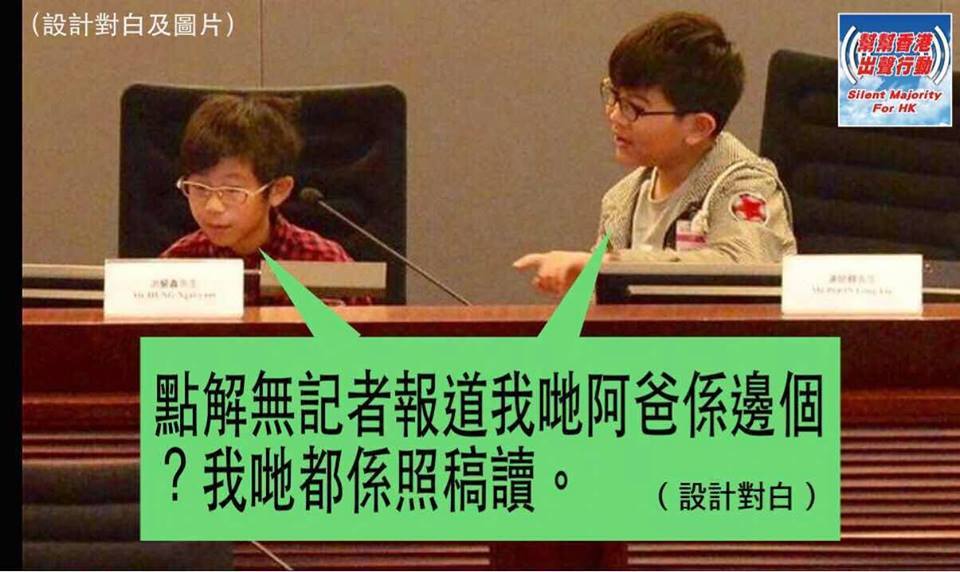
"How come no journalists reported on who our fathers are? We were also
reading scripts."
Spoof script:
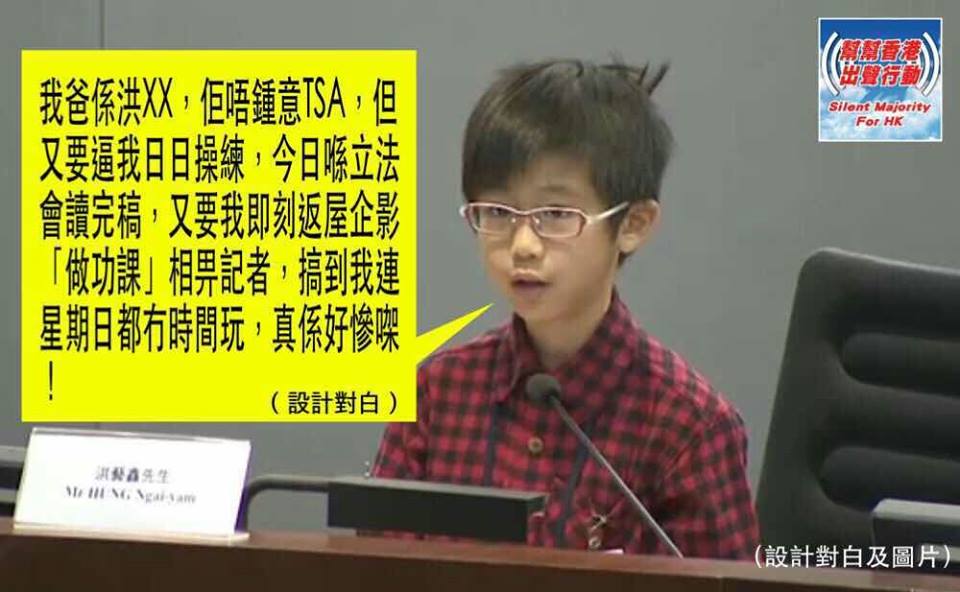
"My father is Hung XX. He hates the TSA, but he makes me drill on it
every day. After I read the script at the Legislative Council today, he
wants me to go home immediately so that he can take photos of me doing my
homework to distribute to the reporters. So I don't even get to play on
Sunday. This is really sad!"
- Two kinds of fate after being
placed in the public spotlight. By Chris Wat Wing-yin.
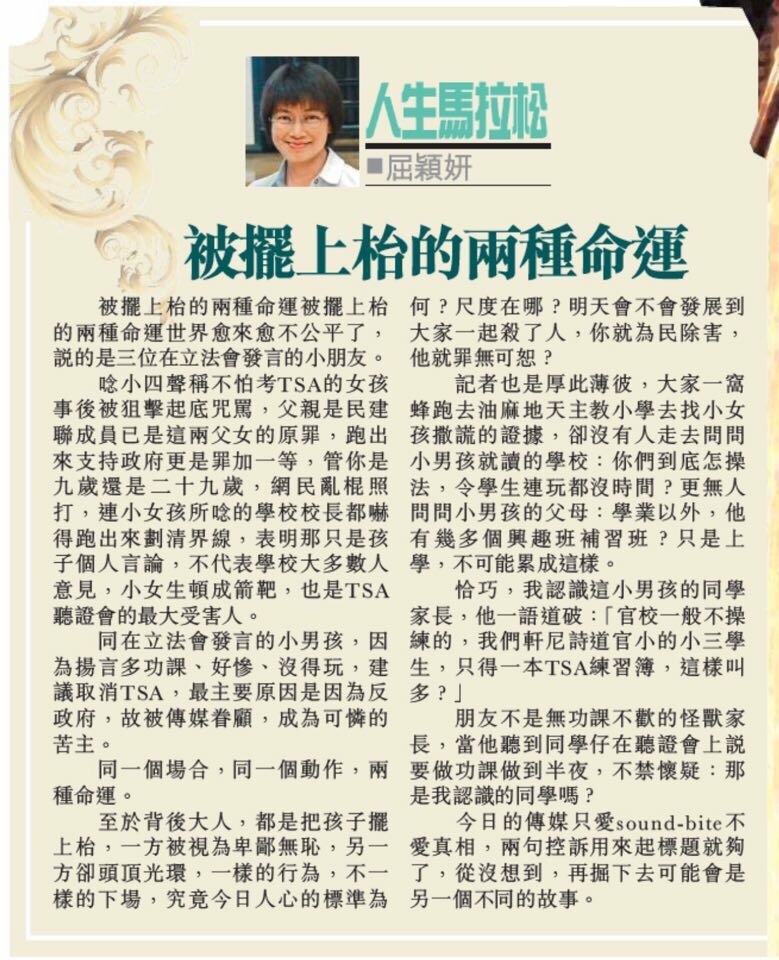
The fates of the three children who testified at the Legislative Council are
unfair. The Primary 4 girl was cursed out because her father's DAB
membership is already an original sin and her support of the TSA made it an
additional sin. It doesn't matter whether the girl was 9 years old or 29
years old, the Internet users will rush out in numbers. The school has quickly
disavowed her, saying that her opinion does not necessarily represent the
majority. The girl was the biggest victim of the Legislative Council
hearings.
Meanwhile the boy complained that he had too much homework and therefore
felt saddened. Therefore he wants the TSA to be eliminated. Because he is
anti-government, the media showered tender loving attention on him.
Same place, same action, different fates.
As for the grown-ups who put the children
in front of the spotlight, one of them is regarded as shameless and the
other was given a moral halo. Same action, different fates. So where do we
stand now? If we both kill someone tomorrow, will you be hailed as a hero
who got rid of a menace while I become unpardonable?
The reporters rushed over to the Yaumati
Catholic Primary School to ferret out evidence that the little girl was
lying. But nobody went to the school that the boy attended to ask: Just how
are you drilling your students such that they have no time for play? Nobody
asked the boy's parents: Apart from studying, how many special interest
classes does the boy attend? The boy could not be that tired just by
studying.
By
coincidence, I know a parent whose child is a classmate of the boy. He said:
"Government schools do not drill. The Primary 3 students at the Hennessey
Road Government Primary School only have a single TSA exercise book. Is that
called too much?"
My friend is not a monster parent who loves to
see homework for children. When he heard that the boy claimed at the
Legislative Council hearing that he studies until late night, the question
arose: "Is this the boy that I know?"
Nowadays, the media only like sound bites.
They are disinterested in the truth. They only need a couple of accusations
to create a good headline. They never imagine that if they dug a little bit
further down, it could be a completely different story.
- (Wen
Wei Po) December 2, 2015.
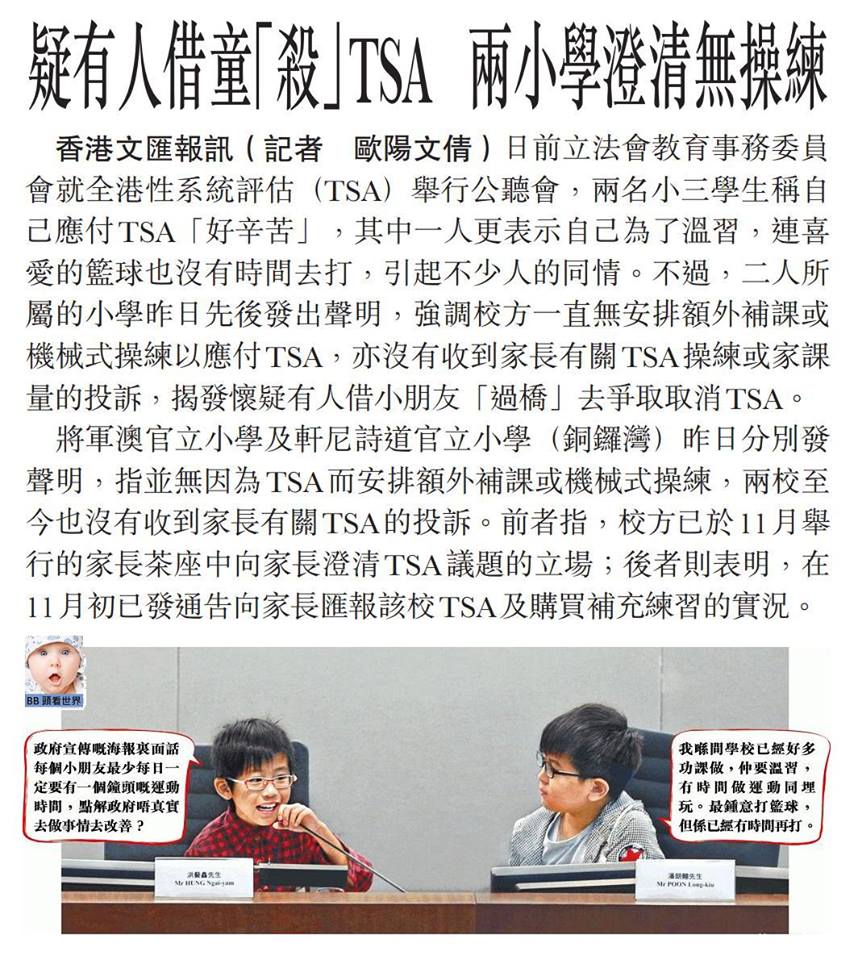
At the Legislative Council hearing, two
Primary 3 boys claimed that TSA is very hard on them. One of them said that
the studying caused him to skip his beloved sport of basketball. Yesterday,
the Tseung Kwan O Government Primary School and the Hennessy Road Government
Primary School attended by the two boys issued statements that they do not
arrange extra teaching or mechanical rote drilling for TSA. Furthermore, the
two schools have never received any complaints about the TSA from parents.
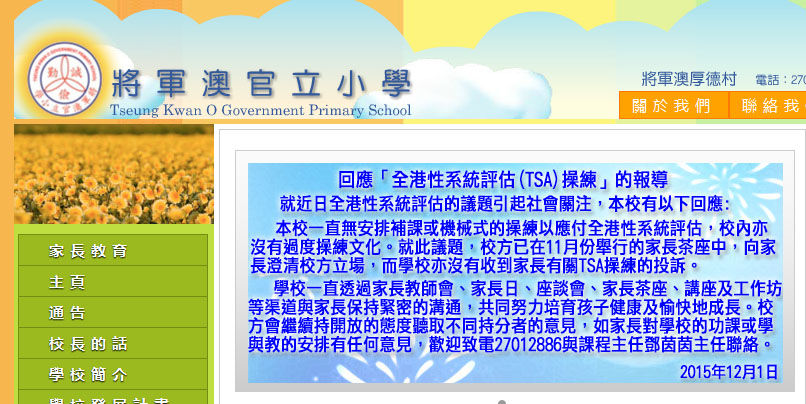
Statement from the Tseung Kwan O Government
Primary School
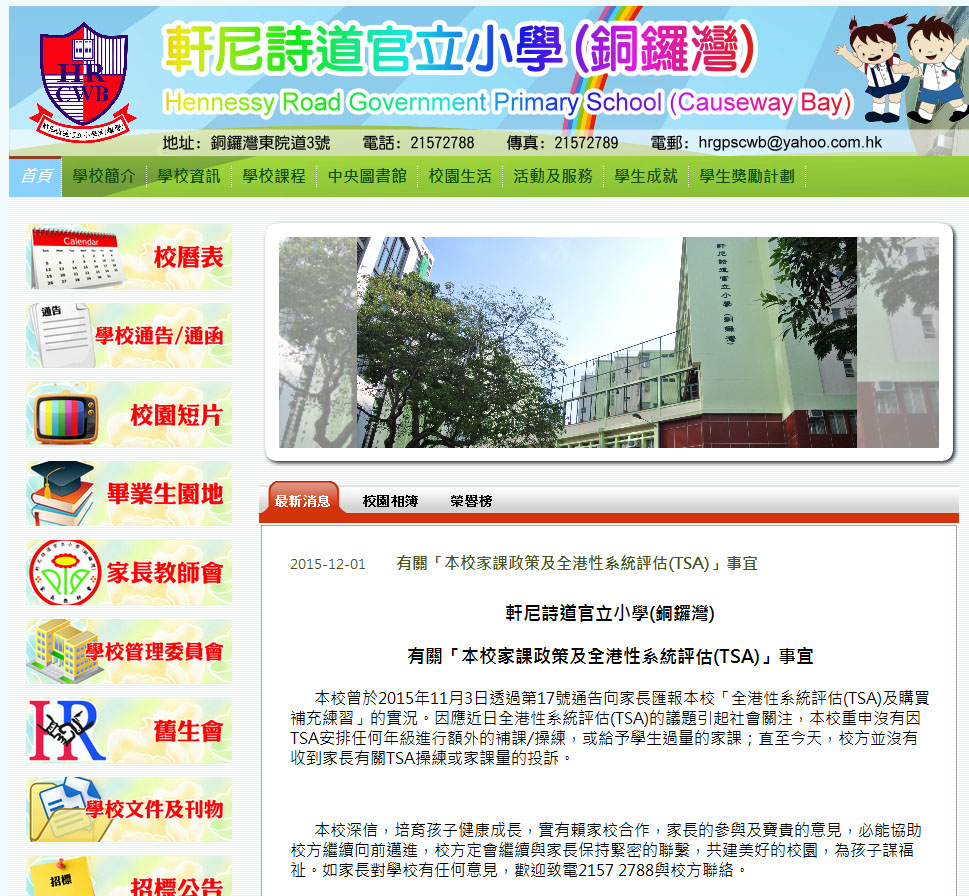
Statement from the Hennessy Road Government
Primary School
- If
not the TSA, then what were the parents forcing the boys to drill on late
into the night? Or was it all just staged propaganda?
- In the United States of America, it would be
a crime to make false testimony to the US Congress/Senate.
- Forgotten in the political imbroglio is just
what the children said.
The girl said that the TSA puts less pressure on her than the regular exams
because the TSA marks don't count for individual students. So she thinks
that it is just fun.
One of the boys said that practicing for the TSA leaves him with no time to
play. So he doesn't like it.
Both are reasonable answers. If you select a large number of Primary 3
students at random, you are likely to come across these opinions. But
because of politics, one side becomes absolutely right and the other side
becomes absolutely wrong. You get to pick which side you want to be on.
- Here are some questions about the TSA?
Without the TSA, will the
children have less homework to do and therefore more free time? No. Their time
will be taken up with drilling for other types of exams.
Does the TSA impose additional coursework on
students? No. The TSA is used internally by the Education Department to
assess the schools and the individual marks are not given out. The
Education Department would prefer the schools to do absolutely nothing
more in order to get a fair reading, but some schools try to get better
scores by drilling their students and so other schools are forced to
follow suit. This is the tragedy.
Does the TSA force the children to go seek
after-school tutoring? No. If you are concerned that your child can't
follow and therefore seek outside help, then something is wrong with your
school. Why is the school unable to teach your child properly?
Does the TSA force the children to seek good
marks to the exclusion of all else? No. The TSA marks are kept for the
Education Department and not disclosed to the outside world.
Does the TSA force the children to learn
what they wouldn't otherwise be taught? No. The TSA materials are the
normal reading, writing, dictation and mathematics. If testing on these
subjects implies undue pressure on the students, then they will have to
eliminate all forms of testing.
Who is feeling the pressure of TSA? The
students aren't, because their marks don't count. The school trustees are
concerned because it reflects on the reputation of and enrolment at the
school, and therefore they apply pressure on the school principal. The
school principal is concerned because his/her job depends on it. The
teachers are concerned because the principal will make it their job to
improve the marks.
What would happen if the TSA is eliminated? That means parents can only
depend on the performance of the children within the school as indicators.
A top student in a school gets accepted in a Band 1 school and suddenly
finds himself unable to follow at all. Why? Because the primary school is
poor overall, and being tops in that school isn't very good in the
territory-wide sense. In the absence of something like a TSA, there is no
way to tell. If not the TSA in this form, then there has to be some other
kind of territory-wide assessment exercise to check on the schools.
- (SCMP)
A simple answer to the angst over Hong Kong's TSA tests: ban schools from
drilling students. By Alex Lo. December 1, 2015.
We politicise everything in Hong Kong. So
it's predictable that political parties are jumping on the bandwagon
against the Territory-wide System Assessment, the much-hated standard test
that has kept our children awake at night studying.
For a long time, it was angry parents
versus education bureaucrats. Now, it's the pan-democrats against the
Democratic Alliance for the Betterment and Progress of Hong Kong. The
latest news has the Primary Four daughter of the DAB's deputy spokesman
Danny Chan Chung-cheung speaking in the legislature in support of the
test. She said the tests made her happy, which was hard to believe. Her
claims were an anomaly as nearly all 130 people who appeared at the Legco
hearing last week criticised the assessment and wanted it scrapped. After
much dithering, Chan admitted he wrote the script for her daughter to read
in public.
As is usually the case, once you have
politicians wringing their hands, the real issues disappear from view amid
the sound bites and bickering.
Introduced in 2004, the tests aim to
assess Primary Three and Six, and Form Three pupils in Chinese, English
and maths. The Education Bureau uses the results to benchmark schools, not
students. Their results don't affect primary students when they apply to
secondary schools. Yet parents and schools persist in drilling young
pupils for the tests.
I would argue it's the fault of schools
and parents who force children to drill for the tests when the bureau has
advised them not to. You have similar tests for the International
Baccalaureate, the programme now used by most international schools in
Hong Kong.
These have not been controversial because
most international schools discourage students from preparing for the
tests, advising instead that they should get plenty of sleep and not to
worry too much.
The problem with government and aided
schools is that many feel under pressure for being benchmarked, and so
force their students to perform well - not for themselves, but for their
schools.
There is nothing wrong with benchmarking,
though. The solution is simple: disallow schools from drilling pupils for
TSA tests and penalise those that do.
- What can parents do to eliminate the TSA?
At one school, the parents threaten to withdraw their children from school
for three days next week. This is just like "Mom, I am going to hold my
breath until you buy that toy for me!" Meanwhile some other parents said
that they will tell their children to fill out their TSA homework randomly
in order to distort the results. Because their scores will be rubbish, the
teachers will have to stop giving out TSA homework. It is not clear if the
teachers will give these students
zero
for conduct. But would that mean success? Well, if the students fill
out their actual TSA also randomly, their school will be ranked the worst in
Hong Kong. You can consider the consequences yourself.
- During Occupy Central, none of the Occupy
Central Trio, the Gang of Four or the pan-democratic legislators have their
own children sleeping in the streets. It was always somebody else's
children. But these anti-TSA parents are breaking the code by making their
own children create bad impressions of themselves for the teachers and
students. So this is a move in the right direction. Any revolution must
start with yourself first.
- Has any discussant actually tried to do the TSA? How
can they say that the students must be drilled repeatedly? Here is a sample
question:
Your fellow student Mary finished second
place in a Toy Design Competition. Please compose a congratulations card
to her and encourage her to design many more interesting toys.
Is that so hard to do? How often do you
have to drill the students on such assignments?
Here are the
2014 TSA question papers.
Here is a sample mathematics question:
You paid 10 dollars for 4 oranges. Each
orange costs __ dollars and __ cents.
If the TSA finds that 90% of the Primary 3
students in your child's school can't solve this question, then the
Department of Education needs to send inspectors over immediately to see
what is going on with the teaching. If the principal and teachers insist
that these children are stupid, the school needs to be purged (regardless of
what the Professional Teachers Union has to say).
- Even before I entered Primary School, my
mother was sending me downstairs to buy things at the store. She would give
me a $5 bill and tell me to buy eggs. I walk all the way down eight floors
to the store. I look at the price -- eggs were 30 cents each. I give the
store manager my $5 and tell him that I want to buy eggs. He gives me 16
eggs and 20 cents in change. I had to calculate whether I got the right
number and the right change. Now apparently, Primary 3 students are
incapable of doing this. I don't know what to say.
- Not surprising, though. A friend of mine told me about her friend's
daughter who just departed to study in England. When the daughter got there,
she called mom immediately about how to make the bed -- she had never made
her bed ever before! So the friend's friend had to walk the daughter step by
step (with mobile phone photos) on how to make the bed. Such being the case,
why would the daughter know anything about the price of an orange?
(Hong
Kong University Convocation) The number of members entitled to vote
present in person or by proxy ("registered voters") as per the register of
voters is 4454.
Motion #2A: This Convocation
deplores the decision of the University Council dated 29 September 2015 ("the
Decision") which rejected the recommendation of the Search Committee for the
appointment of the Pro-Vice-Chancellor (Academic Staffing and Resources)
without providing valid justifications to the Convocation and the public.
4308 (97%) voted for
Motion #2B: The University Council should make public, within 14 days of
this Motion being passed, the grounds and particulars as well as the matters
relied on that justify its view that the Decision is in the best long term
interests of the University.
4345 (98%) voted for
Motion #3: This Convocation is of the view that disclosure of the discussion
by Council members leading to the decision of the University Council dated
29 September 2015 is in the public interest and in accordance with the
spirit of the Whistle-blowing Policy of the University of Hong Kong.
4271 (96%) voted for
Motion #4: This Convocation has no confidence in Dr. Leong Che Hung the
Chairman, and those members of the University Council who voted against the
recommendation of the Search Committee on 29 September 2015.
4282 (96%) voted for
Motion #5: This Convocation is of the view that Professor Arthur Li Kwok-cheung
is not suitable to be the Chairman of the Council of the University of Hong
Kong as he does not have the trust, confidence and respect of the academic
and non-academic staff, students and alumni of the University of Hong Kong.
4356 (98%) voted for
(SCMP)
November 29, 2015:
"Anyone but Arthur Li Kwok-cheung" was the
refrain of many University of Hong Kong alumni as thousands returned to
campus yesterday to vote overwhelmingly against the Beijing loyalist's
possible chairmanship of the institution's top governing body.
It was the second extraordinary general
meeting held by the HKU Convocation - a statutory body comprising 162,000
graduates and staff - in three months to vote on motions surrounding the
delayed and now-denied appointment of liberal scholar Professor Johannes
Chan Man-mun as a pro-vice-chancellor.
In September, around 84 per cent of some
9,000 alumni voted to urge the university council to appoint Chan to the
senior post in 30 days and to offer legitimate explanation if it did not.
But the motions failed to persuade the council, which officially voted Chan
down a month later. He had been the search committee's sole candidate for
the job.
Yesterday about 4,400 people voted on five
non-binding motions, which included calls to criticise the council's
decision on the appointment and to oppose council member Li, an executive
councillor reportedly being considered to succeed Dr Leung Che-hung as
council chairman.
High-profile alumni, including Democratic
Party founding chairman Martin Lee Chu-ming, former chief secretary Anson
Chan Fang On-sang, and Commercial Radio chief adviser Stephen Chan Chi-wan,
all argued Li was not suitable to take the helm.
"Some council members had found Johannes
Chan controversial," Anson Chan said yesterday. "But when it comes to
contentiousness, I believe no one could be more controversial than Li."
Nicknamed "King Arthur" for his hardline approach, Li drew attention again
last week after a leaked audio clip suggested he had proposed taking legal
action against students who stormed a council meeting in July. Chan, the
city's former No2 official, said it would be irresponsible for Chief
Executive Leung Chun-ying, the school chancellor, to appoint Li as it could
provoke further campus unrest and not mend the serious damage that she said
had been done to the council's image.
Some 2,500 people joined a long queue
yesterday to vote in person. At the special meeting, only one of the 20
graduates who spoke said Chan, lacking a PhD, should have been rejected.
Ip Kin-yuen, education sector lawmaker and
convenor of the HKU Alumni Concern Group, said it was hard for the meeting's
turnout yesterday to exceed September's, but he believed alumni could still
make a difference. "The government would have already announced the new
chairmanship of the council had the alumni and staff not previously
expressed their strong views," he said.
(RTHK)
November 29, 2015.
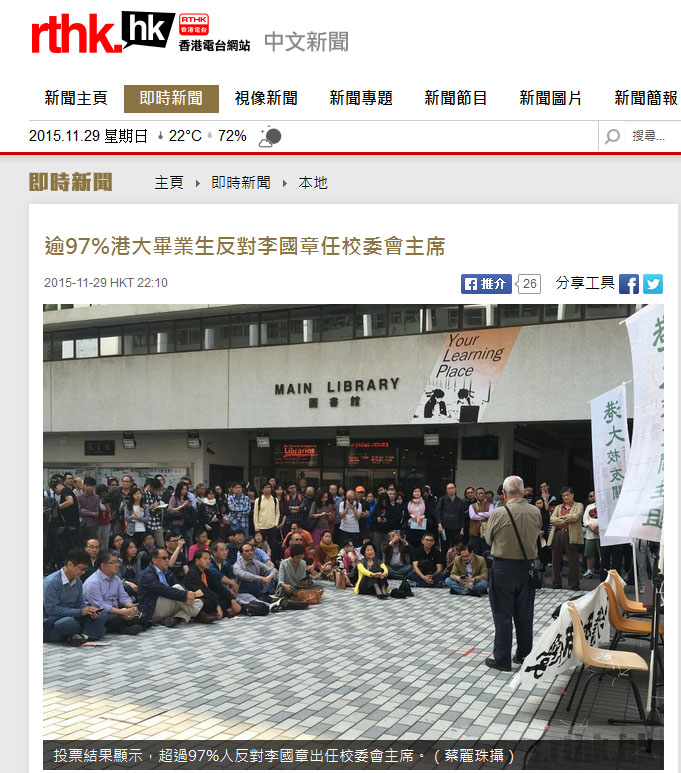
RTHK headline: More than 97% of Hong Kong
University graduates oppose Arthur Li Kwok-cheung as university council
chairman.
The Hong Kong University alumni
held an Extraordinary General Meeting to pass the motion that "university
council member Arthur Li Kwok-cheung is not suitable to become the council
chairman."
4,454 persons
voted on the motion, of which 4356 (that is, more than 97%) believed that
Arthur Li Kwok-cheung is not suitable to become the council chairman.
There were 25 votes opposed and another 10 abstentions.
At this meeting, the motions of "no
confidence in the university council chairman Edward Leong and the council
members who voted against the recommendation of the selection committee,"
"the details of the September 29th meeting should be disclosed for the
sake of public interest" and "expression of extreme regret of the
university council voting against the appointment of the pro-vice
chancellor and not providing any reasonable justification" were all passed
with very high votes.
Internet comments:
- According to the University of
Hong Kong Convocation, the total number of members is 165,450.
4,356 voted for the motion that "university
council member Arthur Li Kwok-cheung is not suitable to become the council
chairman." That would be 4356 / 165450 = 2.6%.
Since these 2.6% have spoken out, the rest
of us must obey what they say PERIOD END OF DISCUSSION.
- Why couldn't EJ Insight simply state that
only 2.6% voted? Instead they could only bring themselves so far as to
report that "the turnout was lower compared to that in the previous
meeting, Ming Pao Daily reported." All the information (total number of
members and the number of votes by motion) is available on the Hong Kong
University Convocation website. It couldn't have taken more than 3 minutes
to obtain everything.
- So 4,356 voted for that motion against Arthur Li. I am sure that if we
ran an online poll at any large discussion forum (e.g. Hong Kong
Discussion Forum), we can get 10 times as many people voting for Arthur Li
within 12 hours. But what is the point? These votes (the 4,356 and any
other voting) are all non-binding.
- The whole issue about the headline
writers' misleading use of numbers has been beaten to death already. See
for example #314 (Hong Kong
University Convocation Extraordinary General Meeting in September) and
#360 (Hong Kong University,
staff and student referendum in October). But that won't stop RTHK from
doing the same thing over and over again.
- By the way, RTHK also decided the skip the minor detail that the vote
was non-binding. Of course.
- At some point, the Hong Kong University
Convocation is going to start rebelling against these non-binding
referenda. It is easy to trigger a referendum, because all it takes under
existing rules is 20
signatures from alumni. But each event incurs time and costs (rental, labor, etc) and
the bill will go out to the alumni, who will have questions about the
costs and benefits. They've asked the questions, they've gotten the
answers already and so why is it necessary to ask the same questions every
month?
-
Arthur Li Kwok-cheung was humorous about the situation. When asked whether
he would be the new chairman of the HKU Council, Li replied: "You should
be asking Ip Kin-yuen that."
- After running a relentless campaign
against Arthur Li Kwok-cheung, what if the Chief Executive appoints
somebody functionally equivalent to but less notorious than Li? Ip Kin-yuen
and crew won't have any time to mount yet another campaign against
whoever, because the public won't have the patience and energy to listen
to more of this.
- Ip Kin-yuen's point of
argument needs to be less focused on Arthur Li and more on any appointee
needing to have "the trust, confidence and respect of the academic and
non-academic staff, students and alumni of the University of Hong Kong." And
who is to determine the person has those qualities? Ip Kin-yuen, of course. In
so doing, he will have to overcome the mistrust of the general population that
any public university accepting vast amounts of tax subsidies should be beyond
public scrutiny and accountability.
- Ip Kin-yuen complained today that he is
overworked and fatigued. Actually, I am fatigued too. Will Ip Kin-yuen
please stop!?
- Given
the fall in participation rate between the first and second extraordinary
general meetings, HKU Convocation motions are no longer useful. A third
round will have even fewer participants and probably a blowback from the
majority. The only
thing left in Ip Kin-yuen's arsenal is the class/labor strike when the
council
chairman is announced. But he can't be sure of the participation rate
either, given that it didn't work during Occupy Central.
- For the next HKU Convocation
Extraordinary General Meeting, it should be easy to get 20 signatures to
request this motion: This Convocation is of the view that Ip Kin-yuen is not
fit to issue demands on the HKU Council as he does not have the trust,
confidence and respect of the academic and non-academic staff, students and
alumni of the University of Hong Kong.
- The RTHK reporter may have no compunction
about writing that headline, but even Ip Kin-yuen is too embarrassed
because all he can say is: "Regardless of the sizes of the numbers, the
important thing is the spirit of it."
- More accurately, there was no fighting spirit left.
- Former Chief Secretary Anson Chan also
showed up to vote. She said that Arthur Li has been unfriendly towards
Hong Kong University in his words and actions lately. She referred to
Arthur Li's role as trustee and chancellor at the Chinese University of
Hong Kong. Of course, she has no idea what she was talking about. Arthur
Li served as the vice-chancellor at the Chinese University of Hong Kong.
He has never served as a trustee. Furthermore, the chancellor at all eight
universities is always the Chief Executive by law. Why should you pay any
attention to advice from someone who can't even get the most basic facts
straight?
- (SCMP)
Ip Kin-yuen, education sector
lawmaker and convenor of the HKU Alumni Concern Group, said it was hard
for the meeting's turnout yesterday to exceed September's, but he believed
alumni could still make a difference. "The government would have already
announced the new chairmanship of the council had the alumni and staff not
previously expressed their strong views," he said.
The reason why the new chairman has not yet
been announced is because the students, alumni and staff act as if it is
morally justified to physically assault council members (cf. the July
meeting) and air secretly made audio recordings of meetings. Why is Arthur
Li or anybody else interested in the job? It doesn't pay anything and it is
dangerous to your health.
- If you hold a referendum among a group of
drug addicts about whether drug use should be criminalized, you can
probably guess what the result will be. Most of them will object. If this
group designates themselves as the Mental Health Concern Group and they
have a 93% objection rate amongst themselves, they can claim that that
most citizens oppose the criminalization of drug use. Recently, there are
a number of "concern groups" who hold referenda with one-sided results.
With "public opinion" now backing them up, their leaders come out and
issue demands in the name of the people of Hong Kong.
Of course, they are quite civilized. All
they want is a dialogue with you. But their idea of a dialogue is that
they surround you, they shout their demands in your face and you had better
oblige them. And they won't let you leave until you oblige them. Of
course, they won't punch you; they'll only kick you in the shin where the
cameras can't see.
What do they want to discuss? Regardless of
the specifics, it always comes down to "self-determination." This means
that they get to determine everything while you count for nothing. Within
five years' time, self-determination will become the most important core
value of Hong Kong. It goes without say that self-determination will be
the norm on school campuses and in local communities. Eventually the true
purpose will become apparent -- self-determination for Hong Kong in 2047
when One Country Two Systems expires. When 2047 approaches, the Hong Kong
Self-Determination Concern Group will hold referenda to show that the
people of Hong Kong want self-determination; they will demand a dialogue
with the Central Government; if they can't get their way, they will hold
more referenda among themselves to show that the people of Hong Kong
support self-determination.
So from now on to 2047, you will keep
hearing about self-determination, referenda, etc ad nauseum. Get
your earplugs out!
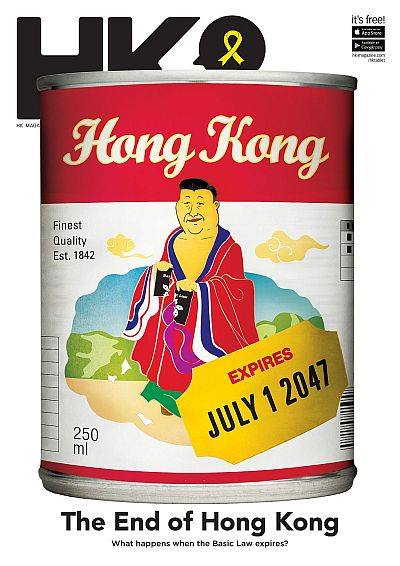
- (Oriental
Daily) Chief Executive CY Leung had a counter-question:
Was it fair to vote no confidence in
ex-chairman Edward Leong Che-hung?
As chairman, Leong has to be neutral and
therefore he did not vote. There is no way to tell whether he would have
voted for or against, so the no confidence can't be about how he voted or
how he might have voted. The no confidence must be about the failure of
the council to deliver the desired result of appointing Johannes Chan as
pro vice-chancellor. But what do you want Leong to do? Procedurally, he
brings the matter up for discussion and then the council members vote. If
Leong overrides a 12-8 council vote by some form of executive fiat, that's
when you should have no confidence in his chairmanship.
- The Hong Kong University Convocation voted
to demand the Council produce the grounds and the particulars of the
decision not to appoint Johannes Chan. After all this time, they still
have no idea how the Council operates. And these are graduates from the
top university in Hong Kong.
Let us go over that again.
The appointment of Johannes Chan is put on
the meeting agenda with the details of the application, the referees'
reports, the curriculum vitae, the recommendation of the selection
committee, etc being provided to Council members beforehand. Council
members can speak out, if they so wish, but they don't have to open their
mouths if they don't want to. When the discussion is done, a secret ballot
is taken. The final vote was 12-8. You don't even know who voted which
way.
The point of the secret vote is that council
members can vote according to their "conscience" without succumbing to any
alleged pressure from Xi Jinping, the China Liaison Office, the American
Consulate, the American Chamber of Commerce, the British Consulate, the
Hong Kong University Students' Union, the Hong Kong University Academic
Staff Association, the Hong Kong University Alumni Concern Group, People
Power/Civic Passion/League of Social Democrats or the bogeyman. Each of
the 20 voting council members have their own individual reasons for voting
his/her way. Given this decision-making mechanism, there is no way of coming
up with a simple statement such as "We the Council feel that Chan is
academically unqualified" or whatever you think.
The "grounds and particulars" would require
each of the 20 voting members to state their vote and provide a written
statement to enumerate the reasons for voting that way. Then you can
tabulate and maybe find something like:
2 NO's because Chan does not have a PhD and
his publications are not cited often enough
1 NO because Chan has a poor impact factor with his publications, even
worse than assistant professors
1 NO because Chan tried to apply political pressure to get this job
1 NO because Chan lacks the academic credentials and tried to apply
political pressure to get this job
1 NO because Chan has been acting in a divisive manner which is not in the
long-term interest of the university. He also failed to meet expectations
in the handling of the secret donation to Robert Chung.
1 NO because Chan tried to apply political pressure to get this job and
has been acting in a divisive manner which is not in the long-term
interest of the university
1 NO because Chan disclosed and discussed his candidacy in the media
against all norms, which means that he cannot be put in charge of academic
staffing because he has zero understanding of personnel hiring practices.
1 NO because Chan is telling the media that he does not want the job but
has to fight for it because it is for the sake of freedom and democracy.
If he doesn't want the job, he shouldn't get the job. There is no reason
to force him to take a job that he doesn't want.
1 NO because Chan is equating his appointment with academic freedom at HKU,
which is totally ridiculous because no HKU professor is going to be banned
from researching any topic if Chan is not appointed.
3 BLANKS because "I don't have to tell you
anything about how or why I voted. The system depends on this in order to
function properly."
1 YES because Chan's academic credentials
are the best in the field of human rights in China.
1 YES because Chan's appointment is the only way to stop further struggles
given that the students and the HKU Alumni Concern Group will never stop
until Chan is appointed. We don't want to see another episode of council
members being surrounded by a hostile mob, because someone might really
get hurt the next time.
1 YES because Chan has already shown that he is a good Dean at the Faculty
of Law.
1 YES because the post has been vacant for five years and it should be
filled as soon as possible with the only available and qualified
candidate.
1 YES because I have known Chan for 20 years, he is a good man and I know
that he will do a wonderful job.
1 YES because academic freedom at HKU must be defended and the
recommendation of the selection committee has always been and will be
automatically honored by the HKU Council.
1 YES because that is what the students, teachers and staff members demand
according to the various referenda.
[And it could even happen that 10 of them
said they voted YES and 10 voted NO!]
So now that you have the "grounds and
particulars" from the council members, what will you do? You have "no
confidence" in the 12 who voted NO because you reject each and every of
their reasons as specious; and you have "confidence" in the 8 who voted
YES because you accept each and every of their reasons as serving public
justice?
- To the extent that 97.3% of the Hong Kong
University alumni did not vote, it means that there are at least some
people who know not to join a circus. Good for them!
- (Kinliu)
By Chris Wat Wing-yin. December 5, 2015.
... Recently I see that many newspapers use
the headline to report this story: "97% of Hong Kong University alumni
agree that Arthur Li is unfit to become council chairman."
That seems to be quite stunning. The Hong
Kong University Convocation has 160,000 members. 97% of them is 150,000+.
But just over 4,000 voted that day. So where did the 150,000+ figure come
from?
The reason is simple. The title needs to be
changed to "97% of participating Hong Kong University alumni agree that
Arthur Li is unfit to become council chairman." Why did they not print
"participating"? Do they intentionally want to create the impression that
Arthur Li is overwhelmingly by the HKU alumni? Did they intentionally want
to mislead readers that the 4,000 votes represent 97% of the HKU alumni?
At a time when the media sector in Hong Kong
are willing to cover up the facts and ignore principles, when the
Journalists Association becomes a tool to attack the enemies and protect
the allies, we don't have a healthy media environment anymore. If the
media are supposed to supervise/monitor the authorities, they should being by
supervising/monitoring themselves first. If you cannot do that, how can
you pretend that you are defending justice?
- (Oriental
Daily) December 22, 2015.
Recently the word is that the Hong Kong
Government will announce the appointment of a new chairman of the Hong Kong University
Council around Christmas, and that person will be the same Arthur Li Kwok-cheung.
Hong Kong University Alumni Concern Group convener and Education sector
Legislative Council Ip Kin-yuen had said in October that they will file
for a judicial review and use student/teacher strikes to stop the
appointment.
Today Ip Kin-yuen admitted that he did not
expect that the government would postpone the appointment of the council
chairman. If Arthur Li is appointed, he plans to hold assemblies and
marches, but he does not plan to file a judicial review and he does not
mention anything more about strikes. Does this mean that Ip lost? No, he
said, because he has successfully made the government postpone the
appointment.
(Oriental
Daily) November 29, 2015.
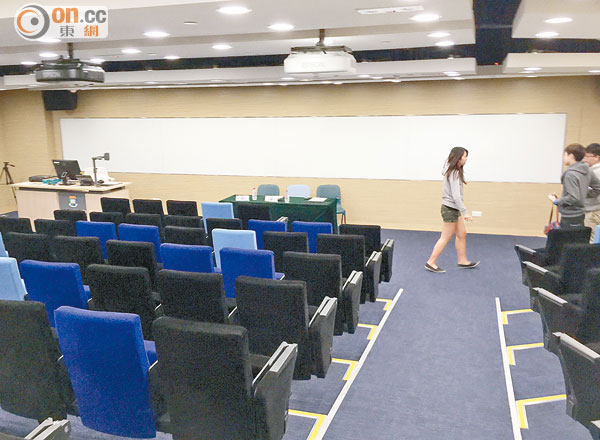
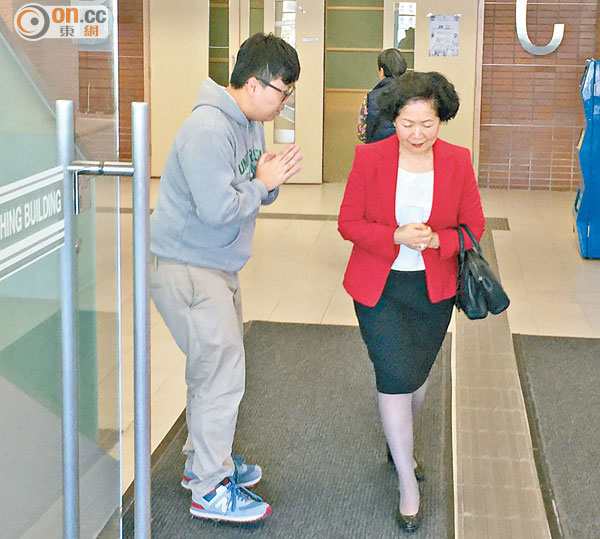
Former Chief Secretary Anson Chan (nicknamed
"Grandma of Democracy") showed up for 30 minutes to campaign for the
umbrella soldier candidate in her district and spent the rest of the day on
hair-dressing and dim sum dining. Yesterday, she came to take part at
a discussion forum organized by the Hong Kong University Students' Union.
There was only one person in the audience. So she got upset and left.
Nowadays Anson Chan is an "old battery" without any energy or attraction.
But at the same time she still wants to act like a big star as opposed to
the struggling bit players who will play even if there is only one person in the
audience.
The Hong Kong
University Students' Union organized this forum on "Imagining the Future Hong
Kong" with Hong Kong University Faculty of Social Sciences dean John Burns
to discuss the topic of "Hong Kong civil service and the problems of
governance in the Hong Kong Special Administrative Region." Anson Chan
arrived 15 minutes early for this 10am meeting. She said that she would
welcome questions from the students. But the time 10am arrived, the total
number of reporters, Student Union members and speakers tallied to fewer
than 10 persons. Anson Chan asked the meeting to be delayed 15 minutes to
wait for the late arrivals. Nobody came. So Anson Chan picked up her handbag
and left angrily while telling the Student Union people to "be better
organized the next time." Thus the sole audience member was left with rows
of empty chairs. The organizer was embarrassed and apologized to Anson Chan
as she stormed out with a taut face.
(Bastille
Post) November 29, 2015.
Anson Chan served as the Chief
Secretary. Even if she does not know the academic research behind the subject,
the other speaker John Burns had edited the book "The Hong Kong Civil Service:
Personnel Policies and Practices" 31 years ago. That book is the required text
for all political science students who are studying administrative science.
How come the students didn't show up? First of
all, the topic was too boring for most. Secondly, the 10am start time for a
Saturday morning is a non-starter. After attending classes for most of the
week, the students get to relax on Friday night. They won't be able to get
out of bed by Saturday noon. Who is going to show up to listen to a grandma
and a grandpa to talk about the civil service in Hong Kong? The lone student
who showed up is a rare specimen. Anson Chan should stay and spend
some time with him.
Everybody thinks that Anson Chan is a celebrity and therefore the students
will flock over to listen to her. Actually, most of the students don't know
who Anson Maria Elizabeth Chan Fang On-sang is. When she retired from the
civil service in 2001, these students were around 5 years old. What
did she expect?
Internet comments:
- When Anson Chan told the Hong
Kong University Students' Union to be "better organized the next time," she
meant that they had better hire extras to fill up the auditorium.
- That's not going to be cheap. People were paid $1,000 to sleep overnight in
Tamar Park tents during Occupy Central.
- The Gang of Four for Democracy in Hong Kong:
Anson Chan, born on January 17
1940
Jimmy Lai, born on December 8 1948
Joseph Zen, born on January 13 1932
Martin Lee, born on June 8, 1938
All Grandpas/Grandmas long past
the expiry dates on the packages.
- Where were HKU students Yvonne Leung, Alex
Chow, Billy Fung, etc? Do they also hate freedom and democracy?
- Actually, Anson Chan isn't so old. Her
behavior in this case is exactly what a
Kong girl would do.
... 'Kong girls' are usually
self-centered and selfish. They always put themselves in an over-high
position and think that they are the most important people in the world.
It is necessary for their boyfriends to do everything for them such as
carrying bags, paying for meals etc. They may complain about their
partners if they do not æserveÆ them. Caring about the feelings of one another
may be a difficult task for Kong girls.
- More past Kong girl behavior: (Wen
Wei Po) October 27, 2011.
Anson Chan was invited to a discussion
forum at the CCC Kei San Secondary School in Fan Ling district yesterday.
According to the principal Yung Kong-shing, who described himself as an
education worker who doesn't lie, here are the unreasonable demands of
Anson Chan:
- She said that she was going to attend a
dinner that night and needed to go home and change first. Therefore, the
forum must end at 345pm.
- The school is required to send a private car to pick her up and take her
back. Since the school does not have an official vehicle, the
vice-principal had to drive his personal car to do so.
- Because Anson Chan was concerned that the audience may raise questions
about the "large donation" from Jimmy Lai, she turned the meeting into a
closed door meeting instead of an open one. The media which was notified
to attend were kept in a first-floor classroom where they cannot hear or
see what was taking place at the meeting.
- Because Anson Chan said she wanted to speak individually with students,
the speech was going to be short in order to allow more time for the Q&A portion. In the
end, Chan took only three questions from the students.
- Anson Chan has issued an "order" that the video of the discussion forum
must not be uploaded onto the Internet.
- As Anson Chan left, a reporter asked: "As a former senior government
official, do you need to explain the secret political donation scandal?"
She said: "No need to explain" and "You can only ask me about the speech
and I am not going to comment on anything else." Then she left angrily in
a private vehicle.
- (Merriam-Webster)
Prima Donna: a person who thinks she or he is better than everyone else
and who does not work well as part of a team or group.
- While the HKU students party and sleep,
here is what is happening in Tsinghua University (Beijing). This photo was
taken by Taiwan KMT legislator Tsai Cheung-yuan at 2am in the packed
Tsinghua University Library when the temperature is minus 5 degrees
centigrade outside.
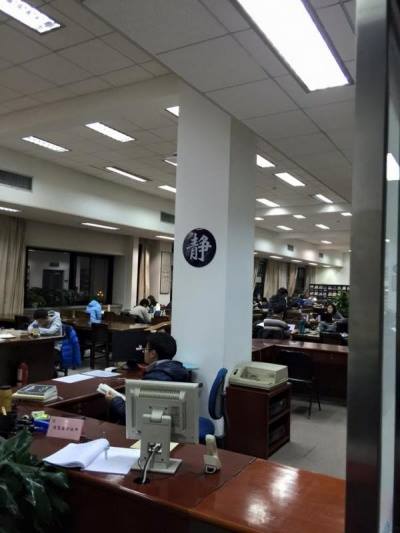
By contrast, the Hong Kong Professional Teachers Union want the students to
go out on strike.
- What are Hong Kong university students up
to instead?
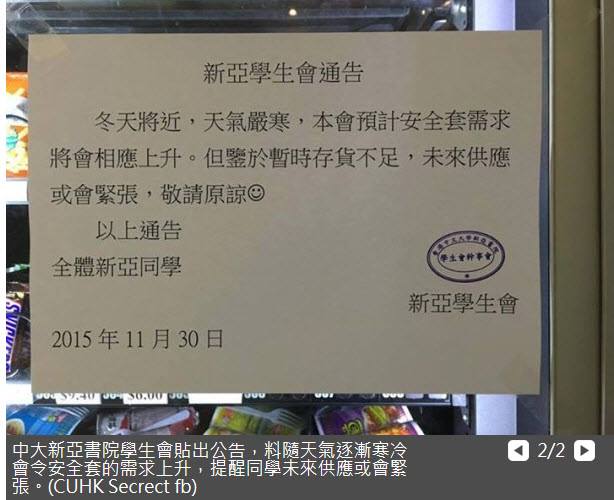
Notice from the New Asia College Student Association (Chinese University
of Hong Kong):
To all fellow students at New Asia College:
Winter is coming and our association projects that the need for condoms will
rise.
Because current inventories are insufficient, future supplies may be tight.
Please pardon.
November 30, 2015.
(Apple
Daily) November 27, 2015.
Entertainer Huang An denounced
entertainer Crowd Lu Guangzhong for opposing the Cross-Strait Service Trade
Agreement last year. Huang pointed out that Lu is in favor of Taiwan
independence. As a result, Lu was no longer on the program of the Southern
Strawberry Music Festival in Dongguan city, Guangdong province, China.
Lu issued a statement that he has never taken
part in any political issue, but this did not stem the consequences. Huang
An issued a victory statement: "Lu Guangzhong's December 12th Beijing
concert has been canceled!" He posted a copy of the cancellation notice.
Huang said that he will focus on Lu's December 19th Xian concert next.
Lu said: "I am helpless. I was opposed to the
black-box operation but not the Cross-Strait Service Trade Agreement. I
don't want the misunderstanding to continue to cause antagonisms."
Lu's company said: "We received
news from Beijing that someone has declared that they will cause trouble. We
don't know what that means. In order not to cause grief to the organizers, we
have bilaterally agreed to postpone the concert. We apologize to the more than
one thousand fans who have purposed tickets already." Later, the company
announced that the Xian concert will be delayed for the same reason.
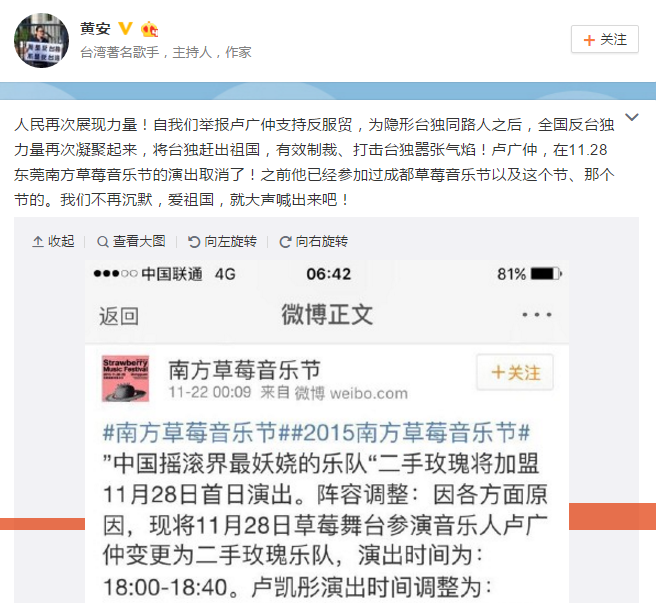
Huang An's weibo.
The power of the people is
once again on display! After I denounced Crowd Lu Guangzhong as anti-service
trade agreement and a covert Taiwan independence fellow traveler, the power of
anti-Taiwan independence forces in China coalesced and effectively curtailed
the voices of Taiwan independence! Lu Guangzhong's November 28th performance
at the Southern Strawberry Music Festival has been canceled! Previously he had
participated in the Chengdu Strawberry Music Festival and this one too. We
will not be silent anymore. If you love the motherland, say it out loud!
(Passion
Times) November 24, 2015.
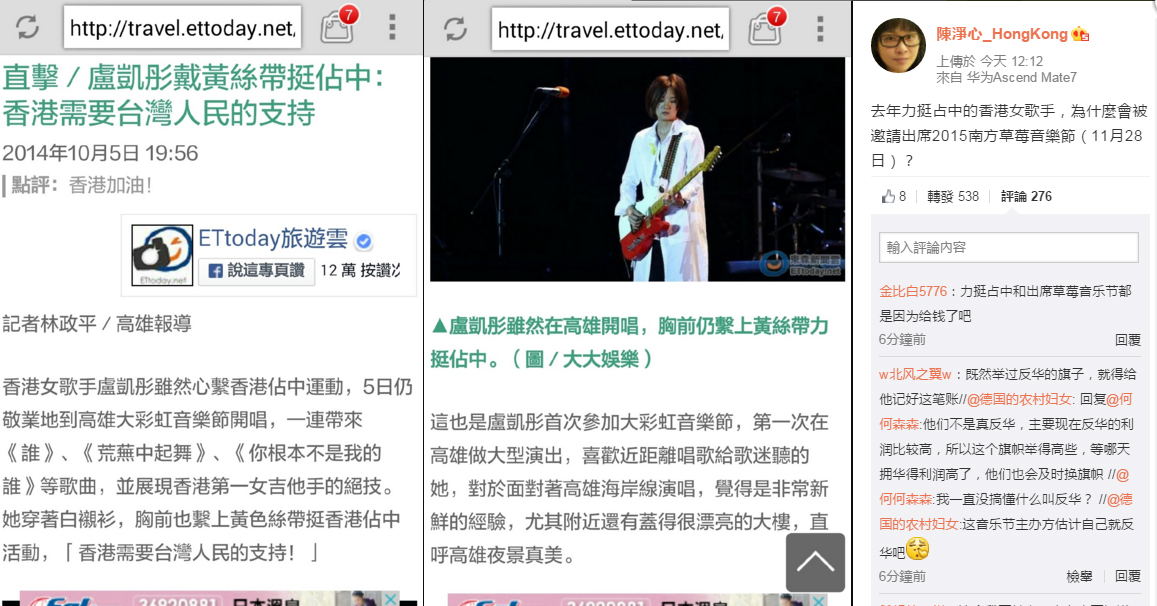
Former Love Hong Kong convener Anna Chan
followed the example of Taiwan singer Huang An and denounced Hong Kong
singer Ellen Loo for supporting Occupy Central last year but is now still
being
scheduled to perform at the Southern Strawberry Music Festival in Dongguan
on November 28th. Chan posted an October 5th 2014 photo of Loo performing at
the Rainbow Bay Festival in Kaohsiung city, Taiwan while wearing a yellow
ribbon in order to ask the people of Taiwan to support Hong Kong.
Many mainland Internet users responded to Anna
Chan's denunciation. One Internet user wrote: "If you want to cause chaos in
Hong Kong and oppose China, you should not be coming to mainland China!"
Another Internet user wrote: "What kind of job is the Ministry of Culture
doing? Hong Kong independence and Taiwan independence advocates are coming
here to perform. Why don't you do something about it? We cannot tolerate such
entertainers!" Another added: "How did you people approve this Occupy
Central singer? All separatists must be ousted from a unified China. We will
boycott!"
(The
Stand) November 25, 2015.
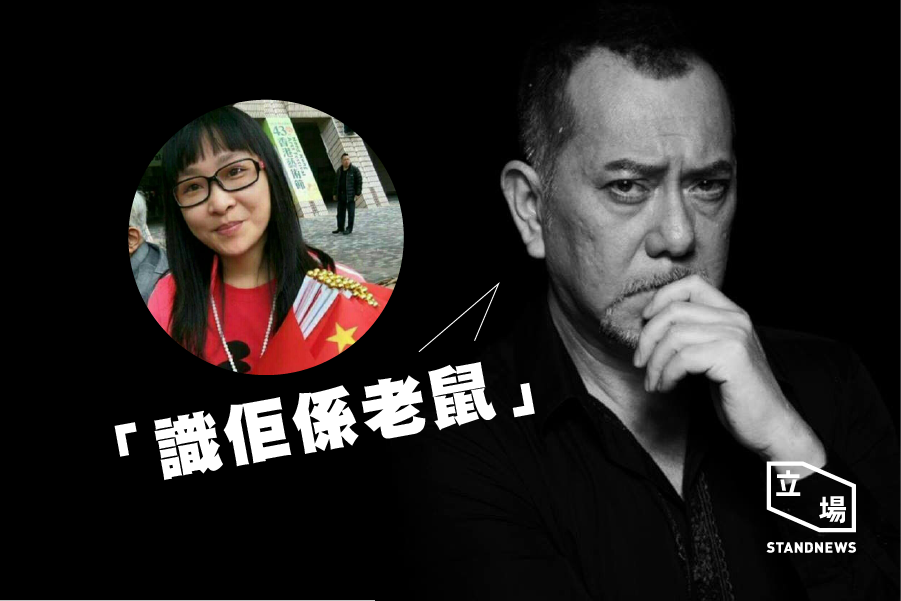
Actor
Anthony Wong responded to Apple Daily about Anna Chan's denunciation
of Ellen Loo: "Anna Chan is just a minor bit player, but now she wants to tell the
director how to do the show. She is saying that the male actor Andy Lau has
the wrong expression. She is like that." Wong characterized Chan as a "fish
tank cleaner": "She eats off the waste products of the fish. What does she
have? She does not hold any public position. Who is she? I know her only as a rat.
These people just wag their fingers at everything and exploit the situation
to gain attention."
Wong
also said: "To respond to her is to elevate her position. I don't have to pay
attention to these political hacks." Wong accused Chan of causing chaos in
Hong Kong: "She is also Occupy Central. She is the black hand behind Occupy
Central. If it weren't for people like her, Occupy Central would not have
been so serious. It is people like her who push others along that
caused the situation to deteriorate in Occupy Central. These are the primal
causes. She should not be allowed to travel to Macau. She is the one with
the problems. She caused chaos in Hong Kong, she raised havoc in Hong Kong.
She disrupted state policies. Hong Kong needs prosperity and stability, but
she keeps coming out to disrupt Hong Kong. She does not want Hong Kong to be
stable and harmonious. She does not support the policies of Chairman Xi."
The Chan-Loo incident has been compared to the
Huang-Lu incident in Taiwan. Previously Huang An had posted photos of Lu
appearing at the Taiwan Parliament in March 2014 to oppose the Cross-Strait
Service Trade Agreement. Huang said: "Dear little friend Guangzhong, why do
you have to force yourself to go to a place which you oppose, object,
despise and deride? A place which oppresses the Taiwan nation?"
(HKG
Pao) November 25, 2015.
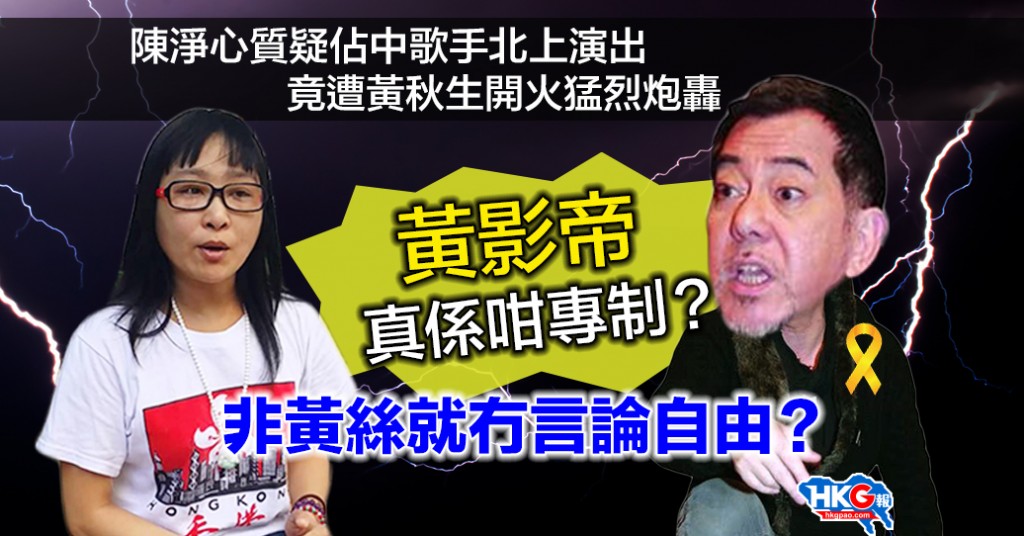
All Anna Chan did was to ask on social media:
"Hong Kong singer Ellen Loo supported Occupy Central last year. Why was she
invited to participate in the 2015 Southern Strawberry Music Festival
(November 28th)?" What is the problem of Chan asking why someone is
"supporting Occupy Central while earning RMB yuan"? Is such a question not
permissible? Is Anthony Wong so dictatorial?
Today Anna Chan responded: "I
exposed Hong Kong singer Ellen Loo for supporting Occupy Central and
therefore she shouldn't be going to mainland China and earning RMB. I wonder
if this is hitting Anthony Wong's soft spot? He kept insulting me to the
Poisonous Media, he said that I am a bit player, I hold no public position,
I am a fish tank cleaner ... he even flipped right to wrong, black to white
and accused me of being the black hand behind Occupy Central. He said that I
was the one who caused chaos in Hong Kong!"
Video @ YouTube
https://www.youtube.com/watch?v=5UQw9_oS0go
(Ellen Loo's Facebook)
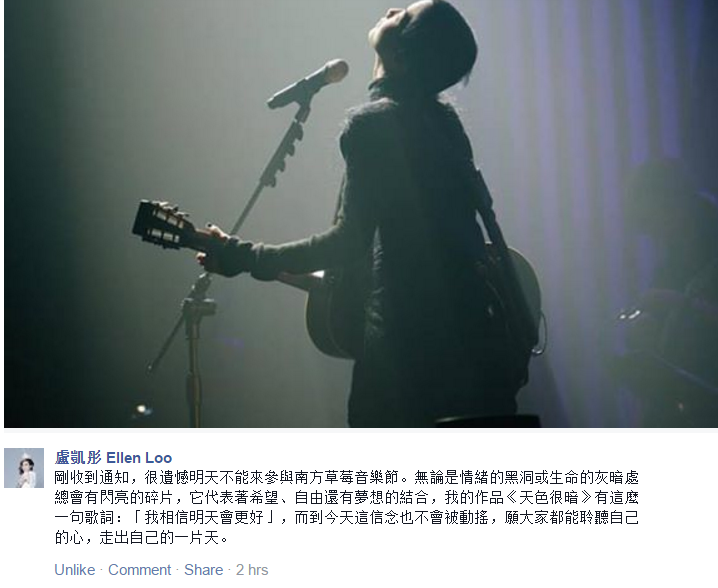
Ellen Loo
I just received notice. I regret that I will
not be able to come and participate in the Southern Strawberry Music
Festival tomorrow. There will also be glimmering shards in even the darkest
emotional holes or gray spots of life. They represent the combination of
hope, freedom and dream. My work "The sky is very dark" has the verse: "I
believe that tomorrow will be better." Today my faith has not been shaken. I
hope that everybody can listen to their hearts and come out of their worlds.
(The
Stand) November 27, 2015.
Eman Lam started singing with
Ellen Loo in the band at 17 for ten years, but they are now solo singers.
Following the withdrawal of Ellen Loo from the Southern Strawberry Music
Festival, Eman Lam also announced on Weibo/Instagram that she won't be
able to participate in the Southern Strawberry Music Festival. She did not
indicate whether this was her own decision to withdraw or the organizers'
decision to remove her from the program. During Occupy Central, Eman Lam did
not make a clear statement of her position.
On Facebook, singer Denise Ho wrote: "Music
represents freedom, it represents imagination. A place without freedom and
intolerant of imagination can hardly have room for music. It depends on
whether you choose fear or you listen to yourself."
Wong Yiu-ming also expressed support for his
protegÚ Ellen Loo: "When Ellen shaved her head, she was ready to risk
everything. Nothing here can strike a blow against her. At least Ellen still
have you, us, and the positive energy and love of the world. To borrow your
beloved Neil Young's verse: Keep on rocking in the free world."
(Anna Chan's Weibo)
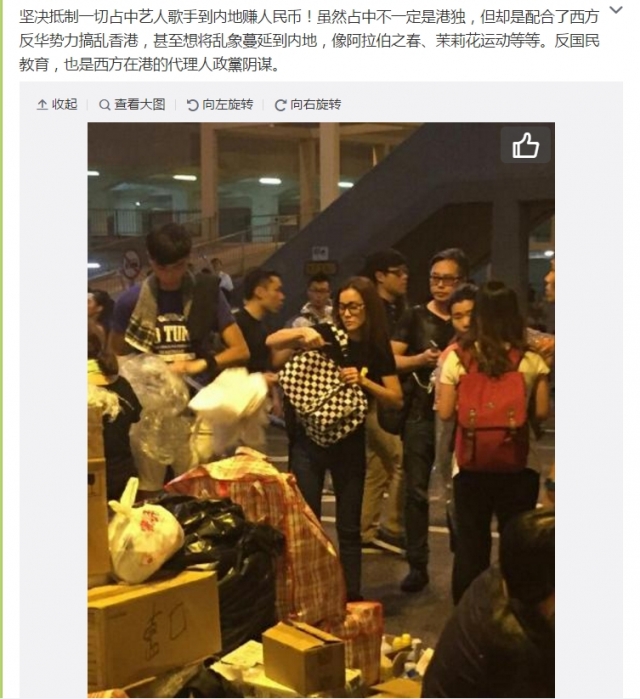
Kay Tse with yellow ribbon down at Occupy
Central
Anna Chan:
"Firmly boycott all pro-Occupy singer/entertainers who are going to the
mainland in order to earn RMB! Although Occupy Central is not necessarily pro-Hong
Kong independence, they are colluding with western anti-China forces to
cause chaos in Hong Kong, even attempting to spread the chaos into China as
in the cases of the Arab Spring, the Jasmine Revolution, etc. The
anti-national education campaign in Hong Kong is another plot by western
agents in Hong Kong."
(Kay Tse's Facebook) November
29, 2015.
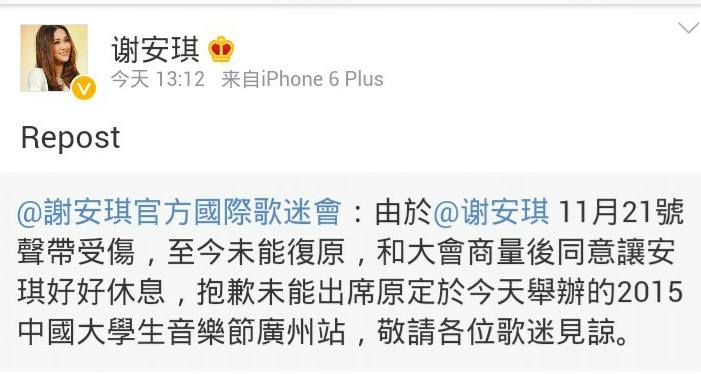
Official Kay Tse International Fan Club:
Because Kay Tse sustained an injury to her vocal chords on November 21 and
has not yet recovered, we have conferred with the Chinese University
Students Music Festival officials and agreed that Kay Tse should rest and
recuperate. Therefore, she will not be able to make an appearance at the
Guangzhou stop. We ask her fans to forgive us.
(Ming
Pao) December 23, 2015.
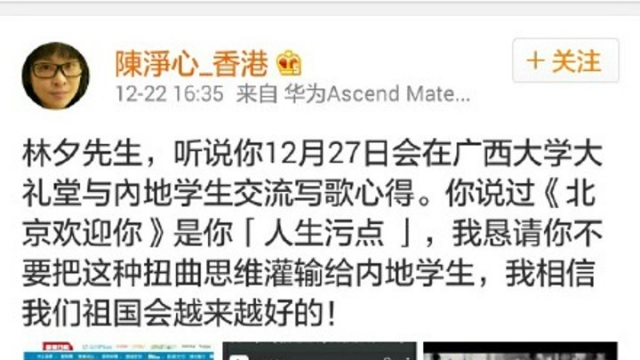
Yesterday Anna Chan wrote on weibo that she
heard that lyricist Lin Xi was due to give a talk at the Guangxi University
Great Hall on December 27. She wrote: "You wrote that writing
Welcome to Beijing is the biggest blemish in your career. I beseech
you not to inject these deformed ideas into mainland students. I believe
that our motherland will be better and better."
Afterwards mainland Internet users left
messages at the Guangxi University weibo: "Do you know that this Hongkonger
opposes mainland and supports Occupy Central in his ideas and actions. He
specifically wrote the song
Who
hasn't spoken up? in support of Occupy Central. Does your university
leader intend to let your students learn to Occupy Central like the Hong
Kong students?"
Late
last night, the Guangxi University Youth League announced on its weibo that
the organizers have cancelled Lin Xi's event.
(HKG
Pao) By Robert Chow. December 30, 2015.
Recently the yellow ribbon
entertainers, Internet users and media outlets have been attacking Love Hong
Kong convener Anna Chan. For example, Anthony Wong accused of Chan of acting
as if she was the Communist Party Central. Another Apple Daily commentator
said that Chan was more than the Communist Party Central, because she is the
reincarnation of (Madame Mao) Jiang Qing. Other Internet users decry Chan for denouncing
entertainers such as Hin Cheung and Ellen Loo for their support of Occupy
Central.
What do the
regular folks think?
Firstly, we have to ask: Is Anna Chan bringing up facts? For example, is it
true that Hin Cheung opposed national education and sang a pro-Occupy song?
Did Ellen Loo support Occupy Central? These entertainers have not denied the
allegations. If they didn't, Anna Chan would have received legal letters a
long time ago already.
Secondly, we have to ask whether these entertainers took on the Occupy
Central halo last year? Did they wear yellow ribbons and announce themselves
as such?
Thirdly, after
the total failure of Occupy Central, did these people want others not to
mention their past and pretend as if none of this ever happened?
Fourthly, who is Anna Chan? How much power
does she have? Does she have a direct line to the Communist Party Politburo?
How many people follow Anna Chan's weibo? The
number is 125,487. Meanwhile Anthony Wong has 4,690,256 followers on Tencent
Weibo, Hin Cheung has 3,790,351 followers on Sina Weibo, and even Ellen Loo
has 132,589 followers. Other people such as Lin Xi have more than a million
fans. So how is Anna Chan going to pose a threat to their livelihoods?
The yellow ribbons is mistaken on one point:
they don't own the world. When they Occupy Central, insult mainlanders and push
for Hong Kong independence, they are not offending just Anna Chan. They are
offending the people of mainland China. Hong Kong has 7 million people, but the
mainland has 1.4 billion people. What Anna Chan is saying reflects what the
mainland Internet users are thinking.
When the yellow ribbons take action or shoot
their mouths off, they don't bother the governments so much as hurt the feelings
of ordinary citizens. These are the consumers. Who on the mainland is going
to offend 1.4 billion consumers in order to support these yellow ribbon Hong Kong entertainers?
Some people say that even without the 1.4
billion mainland market, there is always the 7 million Hong Kong market.
Unfortunately, not all 7 million Hongkongers like the yellow ribbon
entertainers. The base support may be just a hundred thousand or so, and
they have low
spending power. Of course, if 100,000 each spend $500 a month to support
these yellow ribbon entertainers, the Hung Hom Coliseum can be sold out ten
days each month and the movies will sell $50 million of tickets each. The
mathematics is correct. But these yellow entertainers clearly know in their
hearts that their supporters do not put their money where their mouths are.
There are two exits: On one hand, you can apologize for
what you did. If you don't want to apologize, you can explain that it was
all a misunderstanding and then make a pro forma apology ("I am sorry that
some people were offended" which is not the same as "I am sorry for offending you"). Whether the
mainland citizens will buy this or not cannot be guaranteed. On the other hand, the yellow ribbon
entertainers have always insisted that they are courageous, strong-willed
and principled. So they should keep going. It
won't be the end of the world to lose a 1.4 billion market. In this world,
there are always consequences when you do something that you shouldn't be
doing.
So Anna Chan is
not the problem that you have to solve! It is your past that is causing
problems for you today.
Internet comments:
-
Ellen Loo?
Eman Lam?
Who are these people anyway? What have they ever sung? I have never heard of
them before.
- Why are they singing in putonghua? Aren't they Hongkongers with their
own Hong Kong language that is culturally and linguistically different from
and irreconcilable with
the mainland locusts?
- Anyway, are they going to come out of the closet as Yellow Zombie Umbrella
Soldiers? Or are they going to keep being evasive and still hope that they
get a get-out-of-jail-free card some day?
- Look, if this wasn't true, they would have tried to deny it. Instead, they
just took the hit without a fight. Therefore, they must be guilty as charged.
- It is understandable that
mainland music festivals would cancel Ellen Loo. In Hong Kong, everything is
about politics (unlike in the mainland). Who can guarantee that Ellen Loo
wouldn't get on stage with a yellow umbrella? When that happens, Apple Daily
and the western media will use this incident to talk about human rights in
China blah blah blah. Even if Ellen Loo signed an agreement beforehand not to
touch politics, we know that agreements are worthless after Billy Fung's
conscience-free
betrayal of the HKU confidentiality agreement. Whenever freedom, democracy,
justice, human rights, universal suffrage, universal values blah blah blah are
involved, rule-of-law is worthless.
- It is said that China is being mean and
narrow-minded to reject Ellen Loo. Let me ask:
Do you think the United States will admit a pro-ISIS
Syrian singer?
Do you think Germany will admit a pro-Nazi Russian skinhead singer?
Do you think Japan will admit a pro-Dokdo
Korean singer?
Do you think South Korea will admit a pro-Takeshima
Japanese singer?
Do you think China will admit a pro-Senkaku
Islands Japanese singer?
Do you think Japan will admit a pro-Diaoyutai
Islets Chinese singer?
- Fun reading: List of people declared
persona non grata.
- Did Eman Lam back out as a
matter of moral principle? Or does she already know that the game was up:
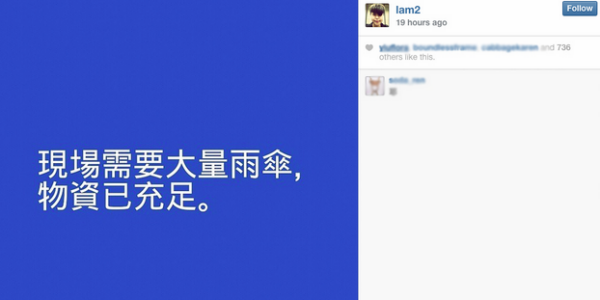
Lam2's Facebook post: We need a large number of umbrellas at the scene.
There are enough materials already.
- Without the mainland market, there is still
the Hong Kong market with a population of 7 million. A singer can make a
decent living here.
- Eh, do you realize that the young people of Hong Kong don't pay for their
music? They only download illegally from the Internet. It is their
inalienable human right. So how are you earn a
living off them?
- We
are Hong Kong. It is a shame for any Hongkonger to cross the border into
mainland China and sell their bodies and souls for a fistful of yuan
notes.
- But why is it not a shame when a Hongkonger travels to Europe or America
to earn money? Isn't he selling his body and soul for a fistful of
dollars/euros? The yuan is convertible with dollar/euro, so what is the
difference?
- Why is singing a concert in mainland China ignoble but
picking lettuce in California noble?
- It is
not clear how the cancellations came about. It does not appear to be an
order from the Ministry of Culture. It is more like a mass consumer
boycott/protest being threatened against the festivals. This is an exercise
of the freedom of expression. And of course we support freedom, don't we?
- Well, the moral of the lesson is that you
need to imitate actor Chow Yun-fat. Since he is a billionaire, he doesn't
have to pay any attention to whether his opinions will affect his movie
options.
- But if you are living from hand to mouth, you can't bite the hand that
feeds you.
- Case study
of the
Dixie
Chicks:
On March 10, 2003, during a
London concert, nine days before the March 19, 2003 invasion of Iraq, lead
vocalist Maines told the audience: "We don't want this war, this violence, and
we're ashamed that the President of the United States (George W. Bush) is from
Texas". The positive reaction to this statement from the British audience
contrasted with the negative reaction including boycotts that ensued in the
US, where the band was denounced by talk-show conservatives, while their
albums were discarded in public protest.
- The Revolution has not
succeeded completely yet, so our Comrades must keep on working hard. Here is
the list of other entertainers who supported Occupy Central but who have not
been banned in mainland China yet.
(Tiexue.net)
http://m.tiexue.net/touch/thread_8670313_1.html
Sample: Gregory Wong.
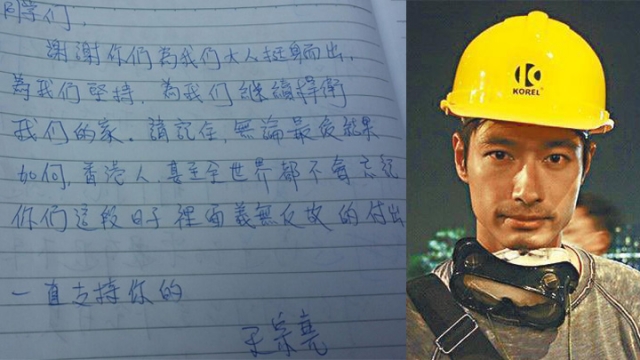
As the Cantonese saying 又要威又要戴頭盔 goes, the guy
wants to grab the limelight and yet also wants to play safe (for example, a
daredevil motorcyclist who wants to look bold and daring, but nevertheless
wears a helmet as a precaution against getting hurt).
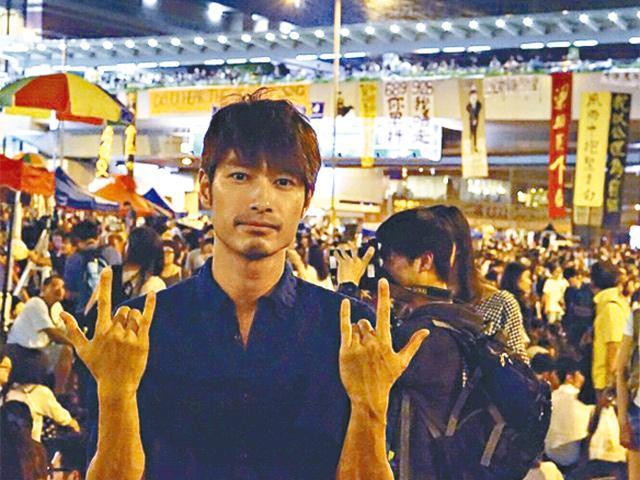
Gregory Wong tells Anna Chan: "Find friends
on Weibo. May you stay on that pure land forever." What does that mean?
Does he want to say that Weibo is unpolluted by Yellow Ribbon rubbish? If
so why does Wong go to pollute Weibo himself? The phrase may seem like a
Zen ko'an, but the truly point is that he couldn't face it. Regardless of
the true meaning of this phrase, Wong's Yellow Ribbon fans are already
banging the drums to celebrate Gregory Wong's moral victory over Anna Chan.
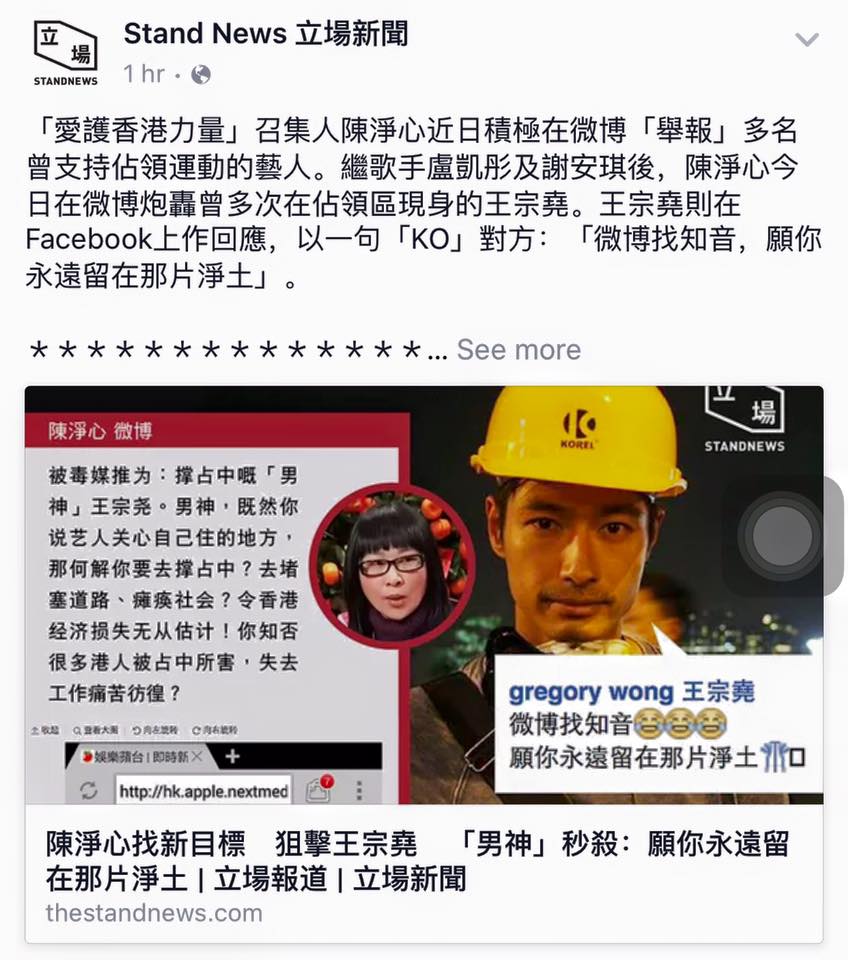
- Can the Yellow Ribbons reverse
the situation by denouncing anti-Occupy Central entertainers to the
authorities in the United States and Europe for supporting the Hong Kong
Police to fire tear gas on unarmed civilians for the furtherance of Communism,
and thus get them banned from performing there? For example, remove all Jackie
Chan DVD's from the stores or stop G.E.M. Tang's world tour. There are several problems
here:
- Use of tear gas by the police
is commonplace in the United States and Europe.
- United States/Europe are not Communist China where singers can get banned
for exercising freedom of speech.
- China is even more capitalist than United States/Europe.
- (HKG
Pao) January 6, 2017.
The popular Hunan Satellite TV
hit show "I Am Singer" will enter its fifth season under the new name
"Singer". They have already announced that Hong Kong singer Sandy Lam will
appear on January 25.
The
news was reported on the Apple Daily Facebook with the tag #Sandy...You...
and the "cold sweat" emoji. Fans wrote: "I am very disappointed as a fan ...
you are free to fucking bark ... I am free to give up on you ..." "Maybe she
needs money, and therefore she is kneeling down in front of the RMB"; "How
can she be poor? She is greedy and she has no backbone." "Sandy Lam is
greedy for money. At this point, she has a car, she has a house, she has a
son. What more does she want!? If she gets more money, can she bring it with
her into her coffin? Meanwhile, singers like Justin Lo and Phil Chang have to
struggle to make money. With your fame and appeal, you can make as much as
money as you like with concerts. Do you have to fucking do this?" "Frankly,
Denise Ho is more admirable for refusing to bend."
In the Yellow Ribbon world, if a small group
of Yellow Ribbons don't like something, everybody else must hate it. In Hong
Kong, something is a deadly sin if the Yellow Ribbons disapprove of it.
-
Apple Daily January 31, 2016. About the more than 10 mainland
concerts that were postponed, Kay Tse said: "I'm very unhappy myself. I've even
cried over it. There are many places such as Harbin which I have never
visited. I know that many fans are disappointed. I am very sorry that I
couldn't keep my promise to the fans." Was there a political factor
involved? "There were many reasons. I didn't really get into them. I hope
that there will be a Part 2 so that I can go there."
-
Apple Daily (November 27, 2015) previously tried to help Kay Tse by saying:
As a Hong Kong citizen, she
cared about society, she worked for charities. On matters of great right
versus great wrong, she will give her voice. She has sung <The Egg and the
High Wall> and <Ka-ming> to provide spiritual support to countless number of
persons. She has supplied materials in a low-keyed fashion to contribute her
share.
She is Kay Tse.
As for Kay Tse, a single photo was enough to
draw a link to the Arab Spring, the Jasmine Revolution, "wanting to spread
chaos into the mainland", etc.
With friends like these, who
needs enemies? Apple Daily wants to make sure that Kay Tse is dead and
buried. She has greater value as a revolutionary martyr than a silent
resister.
- Well, if Kay Tse does not want
any "misunderstanding" on the matter, all she has to do is come out and say:
"I do not support Occupy Central." That's all. Is that so hard?
- Golden Forum user Sister
King told Kay Tse bluntly to show some character and refuse to travel north to rake
in the RMB.
- What is so terrible about
saying that someone took part in Occupy Central? Isn't Occupy Central a good
thing? Kay Tse should be proud about it, and she should be saying what a
noble cause it is.
- Kay Tse should be paying Anna Chan for generating the publicity.
- Anna Chan said that many
people hate her because she is hurting the livelihoods of pro-Occupy
entertainers. But she asked: "Have you thought of how the livelihoods of
many more people were affected during Occupy when the roads, the economy and
the tourism industry were paralyzed? They even got down on their knees to
beg the Occupiers. Do you know how much hurt Occupy Central caused to
patriotic Hongkongers?"
- Is Anna Chan being mean
here? Is it wrong to make denunciations? Well, consider the earlier case of
entertainer Oscar Leung. He gave an interview to Oriental Sunday (https://www.youtube.com/watch?v=ALwGfWjKF_8
)
1:00 (Leung) I think that
people should show a bit more of gratitude and appreciation. And then the
world will become better. A lot of people ... I believe that they are young
people ... they leave messages to attack me on Instagram and Facebook. I
have 100% right to sue them, and I am 100% sure that I will prevail. They
are surely confident. But I don't feel the need to do so. If I did that, I
would be spreading this highly negative thing even further. Actually, we can
be more peaceful.
1:45 (Leung) Also you think
that mainlanders are bad. Why do you think that they are bad? Do you think
that they are bad because they come down to Hong Kong and buy drugs from the
dispensaries? Maybe people born in the 1990's don't know what we who were
born in the 1970's and 1980's like to go to Japan to buy drugs from the
dispensaries. So do they Japanese call you locusts?
2:12 (Leung) So you say that
some of them urinate in the street. I have seen plenty of foreigners urinate
in the street. I am not saying that I think that this is right. But your
vision needs to be deeper and broader. They are not the only ones who are
doing this. A lot of other people in the world are doing that. Because you
think that some mainlanders are behaving badly and so you feel that you are
not Chinese, then I think this is sad and tragic.
2:40 (Leung) There are some
bad people in Hong Kong too. Would you consider yourself not a Hongkonger?
You were born in Hong Kong and you are a Hongkongers. That is an
undisputable fact. You have to remember one thing. When the mainland began
to open up, many of their people have never seen what the rest of the world
is like. They now see what the world is like. But there are some things that
they are not yet prepared for. But that doesn't mean that they will never be
able to do it well.
...
So the pro-democracy crowd
wanted to run Oscar Leung out of town. Since Leung is a spokesperson for
Mastercard, they started a campaign to cut up their Mastercard credit cards in boycott.
What's the difference then? This is a game that both sides can play. It all
comes down to: Who's got more to lose?
- Next up: singer Hins Cheung
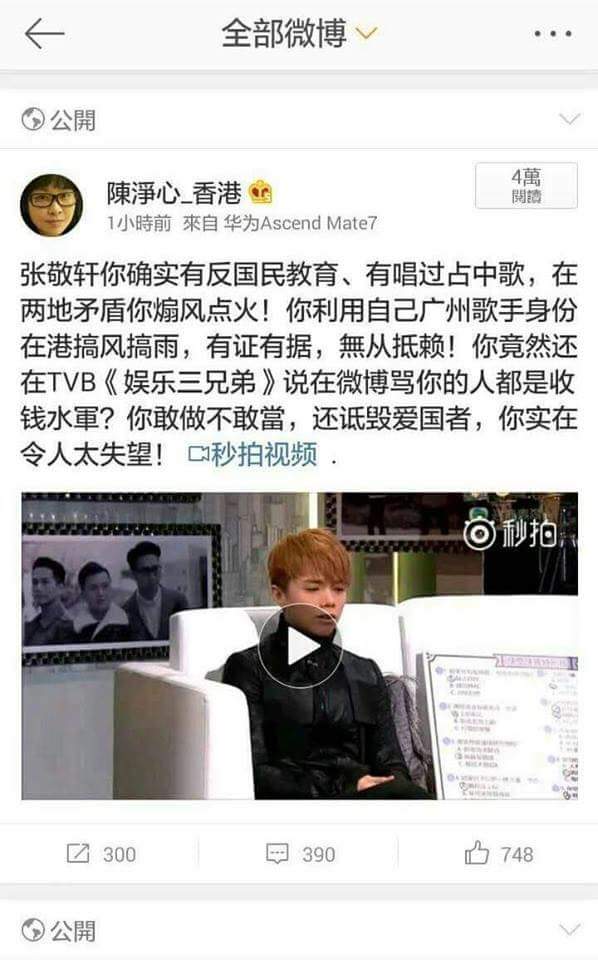
Anna Chan's weibo
Hing Cheung, you opposed national education, you sang
Occupy Central songs
and you inflamed conflicts between Hong Kong and mainland! You use the fact
that you are a Guangzhou-raised singer in order to create trouble in Hong Kong. That
much is undeniable! But on the TVB program <Three Entertainment Brothers>,
you have the nerve to call all those who criticize you on Weibo as being
hired guns who took money? By refusing to acknowledge what you did and also
smearing patriots, you are truly disappointing!
(Wen
Wei Po) December 15, 2015.
Anna Chan offered three pieces
of evidence against Hins Cheung.
1. Hins Cheung said that Hong
Kong is the last piece of clean earth for Chinese democracy. In 2012, Hins
Cheung wrote on Facebook: "I grew up on the mainland. My family background
is pro-establishment. But I am glad that I came to Hong Kong to work, live
and settle down. It let me know the value of freedom and democracy ... Hong
Kong, you are the last piece of clean earth for Chinese democracy. Please be
strong, protect yourself and don't let the next generation be patriotic
without understanding why. Please do not let Gloucester Road, Princess Road,
Prince Edward Road become People's Road, Liberation Road, Harmony Road.
Please let your freedom be forever so. Let the mainland tourists come here
and learn the value of freedom. Today, the color black represents light!"
2. Last year, there was a
mainland child urinating in a Hong Kong street. The poisonous media used
this to fan hatred between Hong Kong and mainland. Government official
Gregory So came out to ask the people of Hong Kong to be tolerant. Hins
Cheung wrote on Facebook: "If I weren't a public figure, I would really like
to visit your official home. But I may urinate and defecate anytime anywhere
I want. You must remember to be tolerant. Thank you!"
3. On December 6, 2015, Hins
Cheung was interviewed on TVB:
Q: Have you done anything on
the Internet that caused a great stir, such that you won't do it again?
A: Someone distorted my comments on Hong Kong current affairs. As soon as it
crossed over the Lo Wu border, it becomes something different. They will say
that you are supporting separatism, etc. Right now there are still people
criticizing me in the mainland. I ignore them.
Q: You mean that you will say
less in the future or you ignore them.
A: Because I learned afterwards that those people were paid to do so.
Q: Oh, oh, oh. Fifty-cent
gang. Navy.
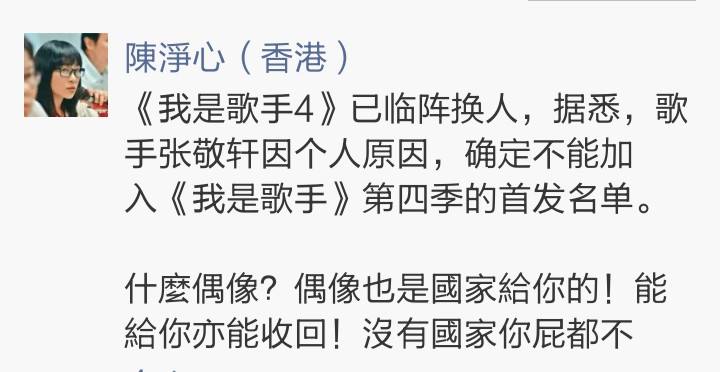
Anna Chan's weibo
Hunan Satellite TV's <I Am A Singer 4> has made changes to its roster of
singers at the last moment. According to information, singer Hins Chueng
will not participate in the launch program due to personal reasons.
What idol? Idols emerge because the country lets you, and the country can
also take it back! Without the country, you are less than a fart!
Internet comments:
- From Hins Cheung's company:
Cheung was approached by <I Am A Singer 4> but there was no final deal. So
it couldn't be said that he was ousted. As for the "personal reasons", they
are personal and therefore cannot be disclosed.
LOL!
- This is actually plausible because Hins Cheung once said that he declined
to get on <I Am A Singer 2> because he couldn't hit the high notes as
expected by the judges and the audience. He also said that the format was
perfect for singers like G.E.M. Tang but not for himself.
- On CCTV's airing of the
reality show "Exceptional Challenge," the actor Wong He's had his face
blocked by mosaic patterns all the way.
Anna Chan praised CCTV for their methodical approach:
If we knew about it, we wouldn't hire you;
If we hired you, we wouldn't film you;
If we filmed you, we wouldn't use your part;
If we used your part, we wouldn't air it;
If we aired it, we would use mosaic to block your face!
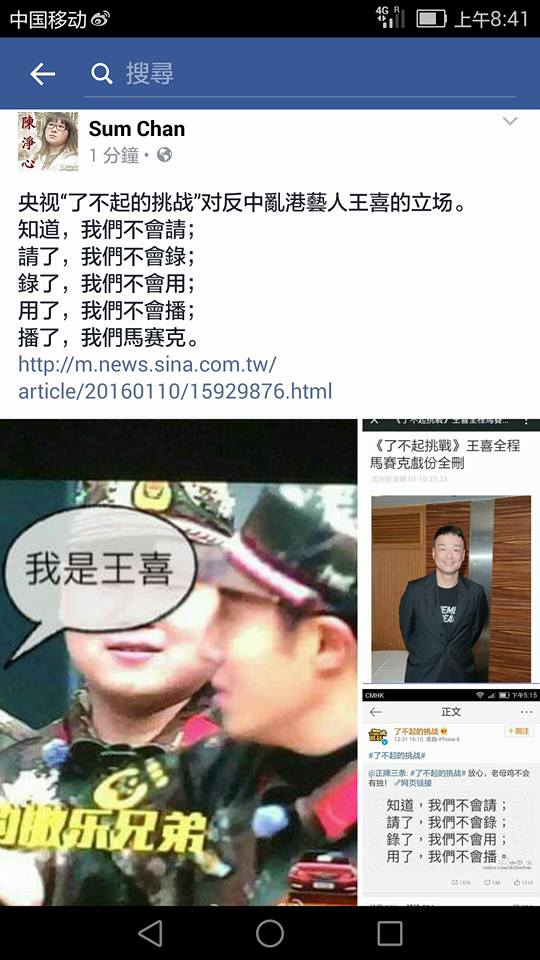
Previously Wong He had forwarded a post on Facebook that 'proved' the late
Chinese premier Zhou Enlai was gay. Wong was denounced by the Taiwan actor
Huang An, who said: "Wong He said that he earned HKD 13,000 per month while
he was at TVB. After the contract expired, he went on to the mainland to
make enough money in one year to buy an apartment and had the chance to be a
director. You make money in mainland China to buy an apartment and you are
having a gorgeous time, and then you turn around to insult mainlanders. This
is the sort of thing that we will denounce."
P.S. On Wong He's Facebook,
there were also posts that criticize mainland tourists and praise the Dalai
Lama as being likeable and respectable. His detractors say that this is
evidence of pro-Hong Kong independence and anti-China sentiments. His defenders say
that this is freedom of speech.
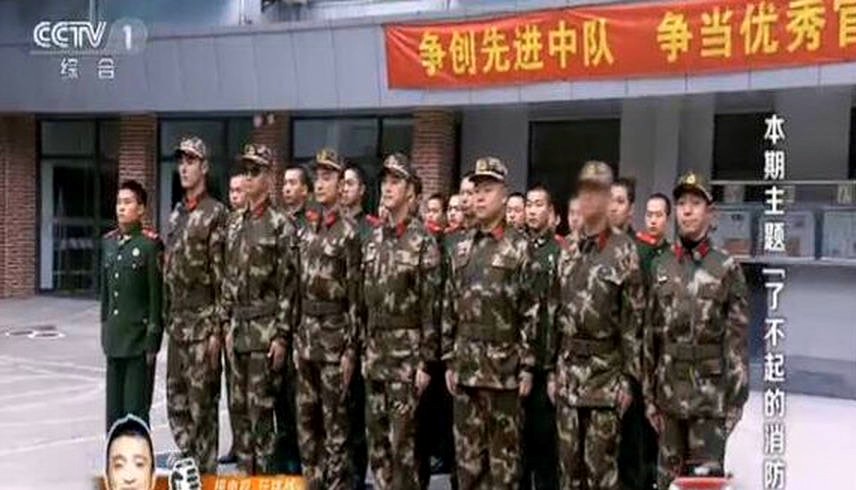
(Wen
Wei Po) On the afternoon of January 11, 2016, Wong He posted on weibo: "I
neither agree with nor support any person or ideas that advocate Hong Kong
independence, and I have the deepest respect for the excellent
accomplishments of the late state leaders." Wong He has deleted all his
previous weibo posts and shut down the comment function on his weibo.
Relevant link:
Headline Pop
News
- Statement from the producers of "Not other
kind of love":
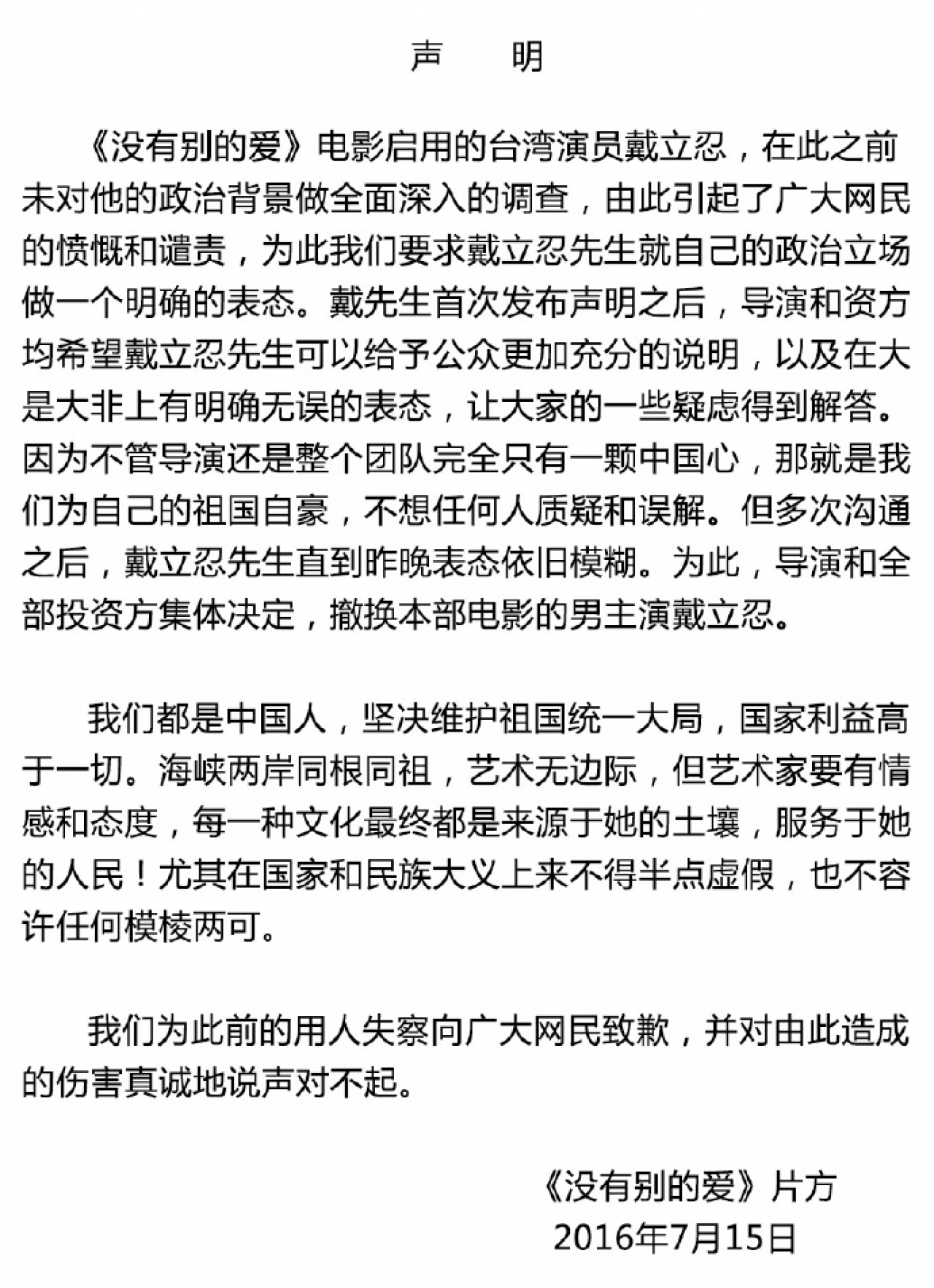
The film <No other kind of love> hired Taiwan actor Leon Dai.
Previously there hadn't been any in-depth investigation into his political
background. As a result, this has aroused the ire and condemnation of large
numbers of Internet users. Thus we requested Mr. Leon Dai to make a clear
statement of his political position. After Mr. Dai made his initial
statement, the director and the investors wanted Mr. Leon Dai to make a
fuller explication and to make an unequivocal statement on matters of grave
right/wrong in order to dispel all doubts. No matter whether it is the
director or the rest of the team, we are all proud of our motherland and we
don't want anyone to doubt or misunderstand. After many attempts at
communication, Mr. Leon Dai has been ambivalent/ambiguous all the way
through last night. As a result, the director and the investors have
collectively decided to replace the actor Leon Dai in this movie.
We are all Chinese. We firmly the
unification of China because the interests of the nation overrides
everything else. The people on both sides of the Taiwan Strait came from the
same roots. Art has no borders, but artists have feelings and attitudes.
Every culture ultimately comes from its earth and serves its people! On
matters of the nation and its people, there cannot be any lies or
ambiguities.
We apologize to the masses of Internet
users for using the wrong personnel previously and we sincerely say sorry
for causing any hurt.
The producers of <No other kind of love>
July 15, 2016.
- (SCMP)
March 4, 2017.
Outspoken actor Anthony Wong Chau-sang claims he is becoming
more reclusive and careful with his words.
After several decades as one of the most recognisable Hong
Kong actors in the film industry, the 55-year-old is these days focusing on
his stage career through his role as co-artistic director of Dionysus
Contemporary Theatre company.
Born to an English father, who abandoned him when he was
young, and a Cantonese mother, he is one of the most prominent graduates of
the Hong Kong Academy for Performing Arts (HKAPA) and has starred in more
than 100 films and television shows. He won the Hong Kong film award for
best actor in 1994 for his portrayal of a sadistic serial killer and pork
bun maker in the horror film The
Eight Immortals Restaurant: The Untold Story (1993).
He spoke to City
Weekend about being
typecast, learning to cook Chinese food and Hong KongÆs lack of democracy.
When you look back on your career, which professional project
are you most proud of? And which would you most like to forget?
IÆm never proud of anything. It is only a job. You only do
your best every time. I like Ip
Man: The Final Fight (2013).
I spent one year to study the characters and kung fu in the style of wing
chun [a form of martial art].
But I donÆt think it is what IÆm most recognised for. The box
office was no good. I got nothing. Every time IÆve liked something, IÆve
gained nothing. For example, The
Eight Immortals Restaurant: The Untold Story (1993),
I hate that movie. And it gave me a lot [Wong won best actor for the role at
the Hong Kong Film Awards in 1994]. I donÆt like the script, I donÆt like
the character. It is selling violence, blood and sex.
Back then, you signed the contract first, then when they
wanted to make the film, sometimes you would get the script and sometimes
not. It was based on a true story, it was very simple. They changed it a lot
in the set; even the rape scene, they made it again. The boss thought it was
not violent enough.
You have said you struggled to get work you wanted despite
winning best actor for Untold
Story û why do you think
this was?
[The film] was crap. People liked it; but just because a
movie is popular, it doesnÆt mean it is good. Drugs are popular. In Hong
Kong movies, I was typecast, so I donÆt have many choices. I had to do it
for a living. That was why I liked Ip
Man. I thought it had more cultural relevance.
I had a lot of projects after Untold
Story, but they were the same characters, like killers.
I was cast in The
Mission (1999) and I did
like that; it was commercial but cool. The picture of that one always come
to my dreams in these few years. I would get flashbacks, because IÆm going
to change my life and my career. I think it signifies a new start; thatÆs
why the picture keeps coming back to me.
You are moving more into theatre; why do you want to do that?
Yes, what can I do? I have been shut out [of film]. Before
that, I started my company. Four or five years ago, I worked with someone
who graduated from HKAPA after me. The whole thing sucked. We called someone
to help. I spoke to my classmates. We said why donÆt we start a new company
together? Because being on the stage, in the theatre, thatÆs my dream. We
started and we had one production each year. After one year, I was shut out
[of film]. I had more time to work on it.
At the very beginning, the goal is to translate the script
because I think the script is good, and they have already had some success.
So it is easy to put on the market. Now we are thinking about having our own
script.
In my life, I always follow the path. If something happens, I
have to do it. I donÆt think too much. But if you enjoy it, you have to do
it, and if you donÆt, you have to do it also. Why not make yourself happier
to just do it?
I like stage and I love to act on stage. It is challenging
and intelligent. After your performance you have got something. You study
the script; the language, character and everything. Every time it is a
learning process. It is not like films, especially Hong Kong films the
scripts are normally terrible.
I like that feeling of having a live audience. And having a
process where we are all working together.
What do you think of the current state of the Hong Kong film
industry?
At the moment, it is finished. When you say Hong Kong film
industry, that means Hong Kong investment and Hong Kong people make it, Hong
Kong actors, just like in the early 1990s. But now they have gone to the
China market, so they have to censor the script, control the story, so more
of the artists are from China.
Does that make you sad?
CÆest la vie;
thatÆs normal. We are always out to go forward. The past is dead, so you
have to move forward, thatÆs just the society. After 1997, the government
changed and the political environment changed, everything changed, the film
market changed.
Before we had Thailand, we had Asia, the whole Asia market,
and now we have less and less. At the end, it is gone, so now we only have
the China market. There is no money to be made in Hong Kong films, you will
only get HK$3 million or HK$4 million, itÆs a very small budget.
Before we had a lot of styles; kung fu, drama, comedy, we
could say anything that we liked, mocking people. There was no limit. But
now thatÆs gone. In Hong Kong in our society, we are sensitive, I donÆt know
what happened.
And what do you think about films like 10
Years, which was banned in mainland China?
I havenÆt watched it yet but I bought it. If it had been
released before 1997, then it might have been a sign of optimism, but itÆs
only a film. It was only put on for two or three weeks and nobody will talk
about it again. It is not worth to put so much effort just to look at it. It
is only a movie, no matter if it is good or not good. ItÆs too much effort
to ban it even; but nowadays we are too sensitive.
Hong Kong is preparing for its next chief executive to be
selected; what do you think of the candidates competing for the position and
how would you characterise the state of Hong Kong democracy?
Democracy? We donÆt have a say. Well before, people used to
say ôAnybody but CY Leungö, and now they are actually saying ôAnybody by CY
Leungö. Are you satisfied? They gave you anybody but him. I think it may be
better than before, no matter who goes on.
But I can see the influence from mainland China increasingly.
It makes me feel like I should shut up, do my job, grab some money and then
go. Every generation has a job to do. If I was in my 20s or 30s, maybe I
would do something more. But now IÆm too heavy to run, to fight, even to
think. I did my best.
Do you imagine you will retire in Hong Kong?
I have to take care of my mum here for the moment. Her health
is not very good. But the good thing is that my children are not in Hong
Kong; they are in Canada and the USA. They donÆt like Hong Kong either. The
education system is better over there.
I went to primary school here and did a couple of years in
secondary school, then went to APA, but I couldnÆt speak English fluently
until I went to the UK for one year and studied acting and I started to
talk. I found out that my classmates from everywhere were worse than me.
I didnÆt enjoy school in Hong Kong; a lot of teachers are
stupid. They were conservative. They wouldnÆt like the little boy to do this
and do that, they want him to sit still. Children are always running around
and screaming, it is normal.
You also said you suffered professionally after voicing
support for the Umbrella movement û do
you regret this?
I donÆt regret it; I did my best. It was not a revolution. I
just never agreed with using violence to get what you want; I donÆt think
the police used the right method, they just made it worse. I was not in Hong
Kong at the time, I was working in mainland China. But for some reason I
could use Facebook, so some people transferred my writing to Weibo. After
that, I was shut out for three years.
So now I will go back to my shell. I will enjoy my life. If
not necessary, I wonÆt talk; I wonÆt say anything. IÆm trying to change my
language and my lifestyle. I have to go to Lan Kwai Fong and meet some new
friends, change my hair. I never thought I was so important.
YouÆve said that in the past youÆve faced some discrimination
in Hong Kong for being Eurasian. How would you characterise that?
I used to, yes, but not any more, because IÆm not really
doing movies. In Hong Kong movies, someone with very clear features and who
is strong would be cast as the bad guy. But if you are short, fat and
baby-faced, 40-something, then you will be a good guy.
Do you consider racism to be an ongoing problem in Hong Kong
society?
Race is always a problem in Hong Kong. 100 years ago, Indians
and Pakistanis came here, and people called them cha û
ôpoliceö û they never get into the majority in society. They are always
silent. After that, the Filipinos and Indonesians came. They are not slaves
but they are treated like lower than us. Even Chinese and Chinese are
fighting with each other.
In a movie, you never have anyone from a minority can be cast
as a leading role, after all these years. They are part of our society; they
build up Hong Kong. IÆm potentially working on a small-budget film which has
a Filipino woman as my romantic partner, and I hope we use a real Filipino
actress.
(Hong
Kong Free Press) November 26, 2015.
The Legislative Council has voted down a
motion to abolish a controversial exam system which has been criticised
for putting too much pressure on primary and secondary school students.
People Power lawmaker Albert Chan Wai-yip tabled the non-binding motion on
Thursday to scrap the Territory-wide System Assessment (TSA) exams after
parents and teachers spoke out publicly against them.
The exams, taken by Primary Three, Primary
Six and Secondary Three students in Hong Kong local schools, are aimed at
gauging studentsÆ ôstrengths and weaknessesö in learning, authorities said.
Although results of the tests do not affect studentsÆ applications for
secondary schools or universities, many feel the pressure to perform well.
Grades-oriented school authorities also give extra work to students to help
them score better in TSA exams.
Last month, a parents and
teachers concern group issued an open letter to Secretary for Education Eddie
Ng Hak-kim urging him to abolish the TSA exams. Meanwhile, tens of thousands
of people have signed up via Facebook for a rally to be held in December. Ng
was criticised by both pan-democrat and pro-government lawmakers at LegCo for
his poor handling of the controversy on Thursday. However, the motion to
abolish TSAs was not passed as pro-government legislators voted ônoö or
abstained.
(Leung Mei-fun's Facebook
November 27, 2015.
Yesterday the Legislative
Council debated the motion to abolish the TSA. I voted for the original motion from Chan Wai-yip and the amendment offered by legislators Lam Tai-fei, Starry
Lee and myself. I abstained on the motions by Albert Ho, Chan Ka-lok and Yip
Kin-yuen. All three amendments proposed to abolish the TSA for Primary 3.
Legislator Albert Ho's amendment proposed to abolish the TSA for Primary 6 as
well. I believe that it is premature to abolish all TSA as yet, and therefore
I abstained. Legislator Chan Ka-lok's amendment wanted to condemn the absence
of the Secretary of Education at an Education Affairs Committee meeting. I do
not believe that this was so serious as to warrant a censure, so I voted
abstained. Legislator Yip Kin-yuen proposed to "immediately stop TSA" but I
believe that "abolish as soon as possible" is more reasonable, so I also
abstained.
Afterwards,
Next Magazine declared that my vote for the original motion and my
subsequent abstentions for the amendments mean that I have "reversed
course." Some Internet users made up a photo of my voting record in order to
mislead the public that I abstained on the original motion. Anyone who knows
anything about Legco procedure would know that amendments are voted upon
before the original motion. So there cannot be a case of voting for an
original motion first and then abstaining on the amendments. Conversely,
abstaining on the amendments first cannot mean the automatic abstention in
the original motion as well.
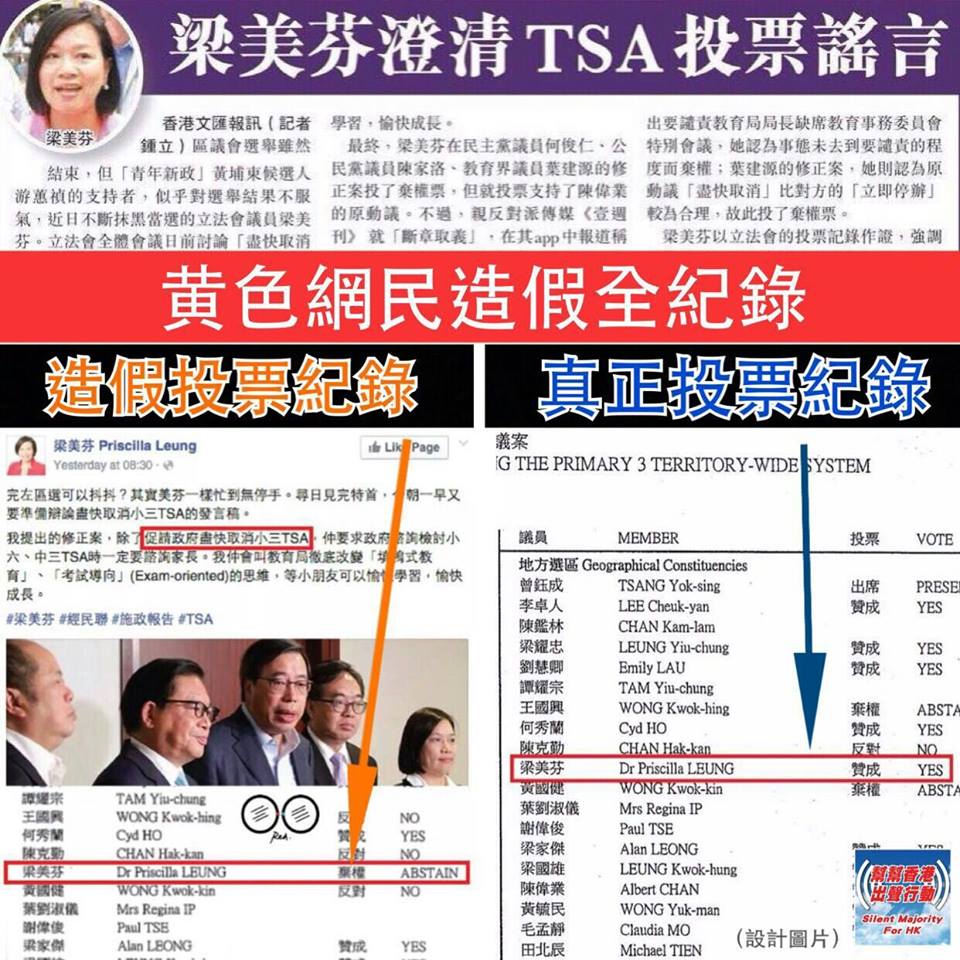
Voting record: Forgery (left) and truth
(right)
I am the mother
of two children and an education worker. I am completely aware that the
public and parents are very concerned about the results of the Legco vote on
"abolishing Primary 3 TSA as soon as possible." But commentary should be
based upon the facts. I deeply regret that certain persons are deliberately
distorting the truth and spreading misinformation.
Internet comments:
- An illustrative example:
Original non-binding motion by a
legislator: "The Legislative Council urges the Department of Education to
abolish the Primary 3 TSA."
Amendment #1: Add the sentence "CY Leung
is a dickhead." This amendment was voted down 36-4 with 20 abstentions.
The 4 knew that it would be voted down, but they wanted politics as
entertainment. The 20 agreed that CY Leung is a dickhead but didn't
think that this should appear in a Legco motion.
Amendment #2: "Add the sentence "The
Legislative Council urges Turkey and Russia not to escalate military
action against each other." This amendment was approved by 60-0. The
motion now becomes "The Legislative Council urges the Department
of Education to abolish the Primary 3 TSA. The Legislative Council urges
Turkey and Russia not to escalate military action against each other."
The amended motion is voted and approved
by 42-0 with 18 abstentions. Voting against any amendment does not imply
voting against the original motion (or its eventually amended version).
- (Wen
Wei Po) November 28, 2015.
"Fuck your mother, Leung Mei-fun! You're the one who wanted to abolish the TSA
and now you're the one who don't fucking want to abolish the TSA! So what the
fuck do you want!?"
"The voters must be visually impaired to vote for you instead of that pretty
young woman!"
"Leung Mei-fun, when you are going to give up district council seat for a more
deserving youngster!"
-
Somebody couldn't face up to losing the district council election, so now
we have a bunch of dirty tricks.
- It is a measure of the character of "that pretty young woman" Yau Mai-ching
to have nothing to say about what is going on here.
(NOW
TV) November 28, 2015.
The Department of Education held
a parents' meeting at the Kowloon Tong Education Service Centre on the TSA. A
group of parents were not admitted into the meeting room. Several dozen
parents held placards to demonstrate outside. They were not admitted even
after the meeting was over. These parents pointed out that the meeting was
open to those invited by the Parents Teachers Association in the 18 districts
of Hong Kong, but there were still empty seats available. However, the workers
refused to let them enter to express their opinions. They questioned whether
the Department of Education is selecting the voices that they want to hear.
(SCMP)
November 29, 2015.
The education authorities yesterday
promised to collect opinions from more parents on a controversial city-wide
exam, after concerned parents expressed anger about being shut out of a
closed-door meeting to discuss the issue. This came ahead of a Legislative
Council public hearing on the Territory-wide System Assessment today, which
education minister Eddie Ng Hak-kim had said he would not attend because of
a previously arranged out-of-town trip for personal reasons.
Over 130 parents who oppose the exam and
want it scrapped for Primary Three children are expected to voice their
concerns at the hearing. Critics suspect that the bureau arranged the
closed-door meeting - to which only a few parents were invited - to collect
biased opinions to counter those of opponents.
Undersecretary for Education Kevin Yeung
Yun-hung said yesterday that staff members collected contacts from parents
who were barred from the meeting on Friday evening and that the bureau would
contact them and listen to their opinions later.
The exam was introduced in 2004 to assess
Primary Three, Primary Six and Form Three pupils' basic knowledge in
Chinese, English and mathematics. But the exams have been heavily criticised
for leading to drilling and excessive homework.
"We regret that [Ng] refused to attend
[the] hearing," said Fung Wai-wah, president of the Professional Teachers'
Union. He said the bureau appeared to be trying to "hastily collect"
opinions in favour of the exam before the hearing.
Ivy Ho Shuk-yi, one of the 13 parents who
were barred from the meeting at the Education Bureau's Kowloon Tong
Education Resource Centre, said she and other parents were told that they
could not enter the meeting venue because they were not registered. She said
the meeting room, with only around 20 parents inside, was half empty. "We
are worried that the bureau was trying to collect only the opinions it likes
and the meeting was just for show," said Ho.
Yeung said the parents who attended the
meeting were invited by parent-teacher associations so staff members did not
allow participation by uninvited people. He said the bureau would arrange
more meetings to collect opinions and would follow up with the parents who
left their contact details. "Consultation can happen many times and on many
levels. I don't think we should focus on a specific meeting and say it's a
fake consultation," said Yeung. "This is not a very fair comment to those
parents who attended the meeting."
Concerned parents will stage a rally
outside the Legco building today. They will host family-friendly games and
activities during the event.
Internet comments:
- With due respect, this is not
a random group of parents who heard about a meeting and showed up
independently. Did they really come here to express their views on the TSA? Or
they did show up to put on a political show for the media? They knew very well
beforehand that pre-registration is required, so why didn't they do so?
Instead, they notified the media to be present and put on a show of sad,
disappointed parents being deprived of their freedom of expression. For the
sake of the television cameras, they even came prepared with those yellow
placards. Who is going to believe that these are "ordinary parents"?
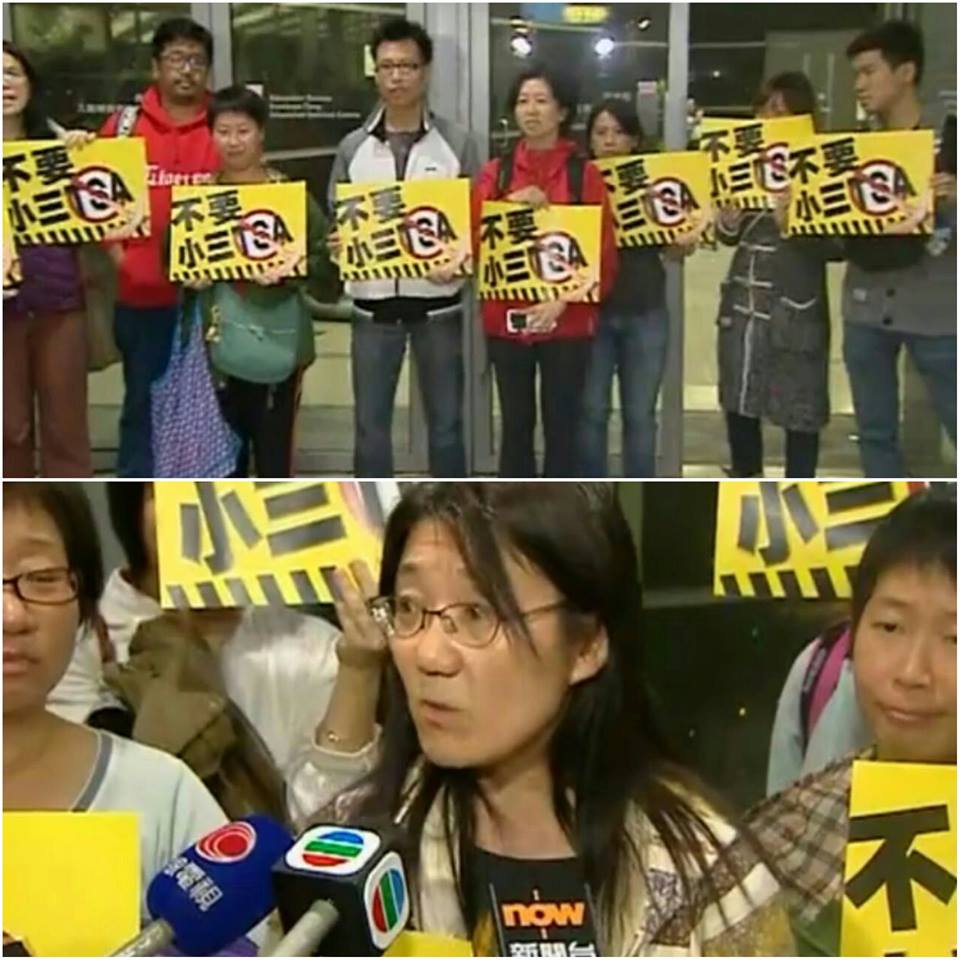
- Someone found the photos of these parents
at the earlier press conference organized by the Professional Teachers
Union with president Fung Wai-wah and Education sector legislator Yip Kin-yuen
in attendance. Same old faces, same placard. So this media was yet
another political ploy by a political party.
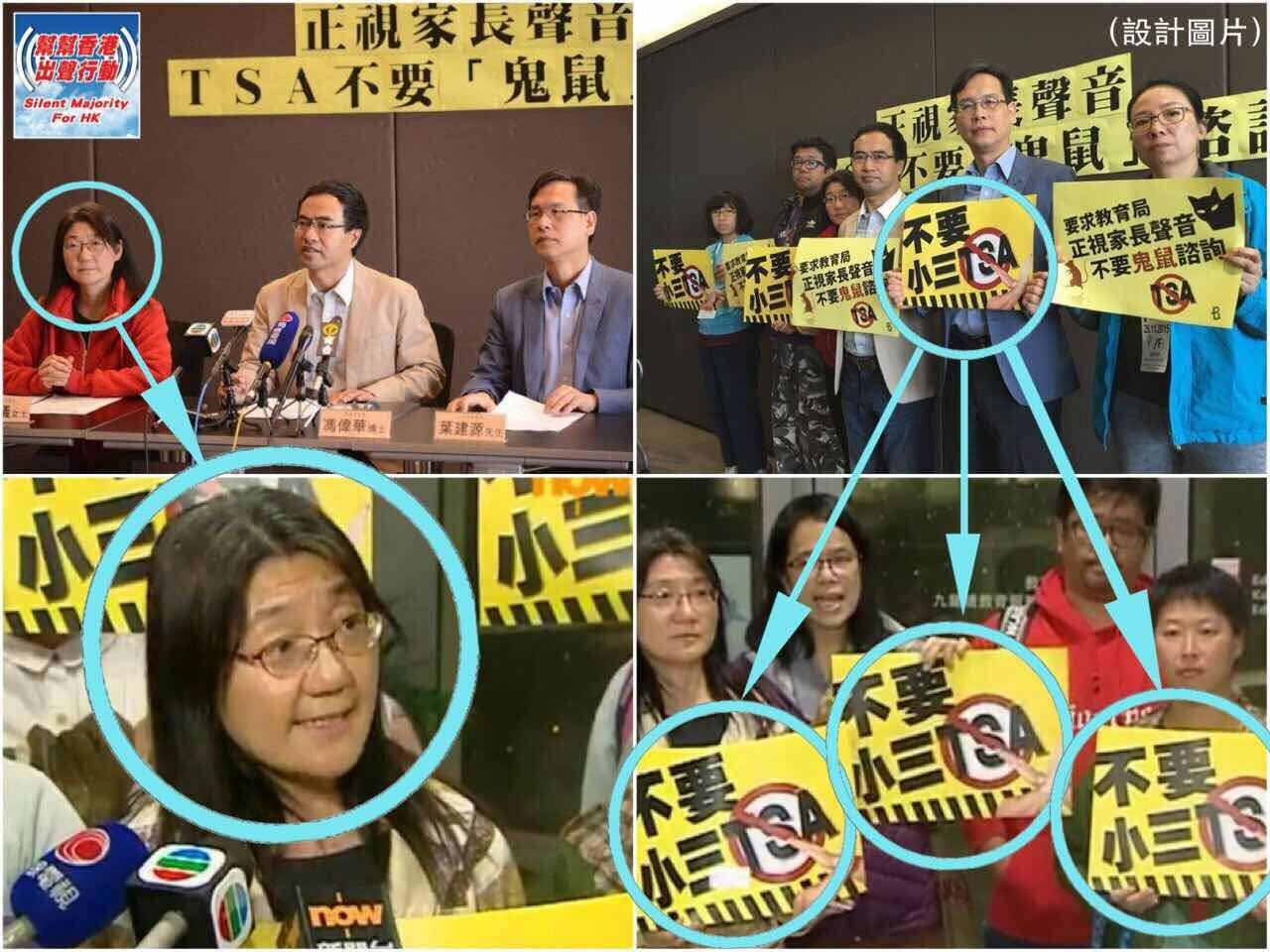
- (NOW
TV) Four parents and education workers who are concerned about the
TSA have demanded the Education Department to cancel the upcoming Primary
3 TSA before Christmas. Wouldn't you know, it is the same old faces.
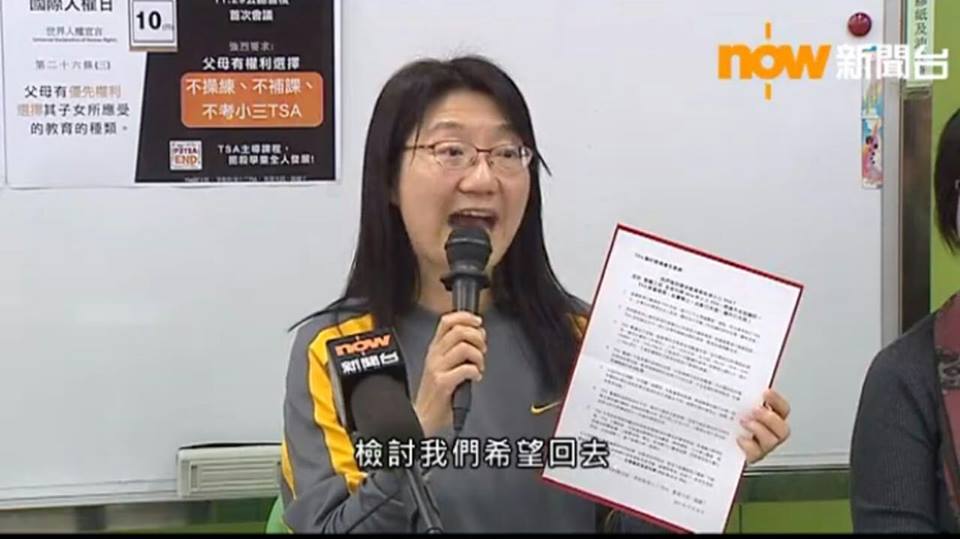
- You hire one or two persons to form some
kind of Concern Group. You hold a press conference, and the press will
simply copy off the press release. In so doing, you have managed to create
the illusion of a mass movement: "The Hong Kong parents demanded ..." or
"the Hong Kong teachers demanded ..."
(Hong
Kong Free Press) November 3, 2015.
A District Council election candidate has
suggested in his latest platform that ôlocal sexy ladyö dancing should be
introduced in Mong Kok, to replace the ôChinese singing auntiesö around the
Sai Yeung Choi Street South pedestrian zone, which he said ôpeople with
normal tasteö find annoying. Nakade Hitsujiko is an IT specialist and localist activist, formerly known as Chung Ming-lun. He changed his legal
name to run in the election in the Cherry constituency in Tai Kok Tsui.
He wrote in an article posted on VJmedia
that since no candidate had proposed any practical plan to completely solve
the issue, he was willing to ôtake up the mission of the centuryö to save
pedestrians from ôbad-taste songsö on weekends. Mr Nakade said he did not
suggest amending the terms and conditions of the usage of the pedestrian
zone, as most of the performers and commercial promotions were
self-restrained, and they did not abuse the right to use the street, unlike
the singing aunties who ôshamelessly seduced local uncles with bad taste
from Chinaà made Hong Kong people suffer, and created unforgettable
psychological trauma for foreign tourists which harmed Hong KongÆs image of
tourism.ö
Instead, he was inspired by a video that
went viral recently. The video, which showed a group of dancing local sexy
ladies, attracted a much larger audience than Chinese singing aunties, he
said. ôIf District Council funds originally used to build useless landmarks
in the district can be used to hire local sexy ladies to perform, then they
can make the Chinese singing aunties feel desolate,ö he said, ôThe aunties
are only there because of money, it can be eradicated by taking away their
source of income.ö
Nakade said that the Yau Tsim Mong District
Council can even make a music video to promote his idea, like the recent hit
from the local girl music group FFx. If his suggestion was approved by the
council, it would bring fame to the council, and be supported by the general
public, he added. ôCatering to the vulgar taste of Chinese tourists for a
long time, which scared off European and American high-quality tourists, is
the root cause of the downfall of tourism in the Yau Tsim Mong district,ö he
said. ôOnly by rejecting Chinese tourists, reviving Hong KongÆs image with
local attractionsà can we attract global high-quality tourists who
appreciate local specialties and local beauties.ö
Nakade added that his suggestion will be
welcomed by both pan-democrats who often campaign at the street, and the
members of the pro-Beijing camp who have a lot of business ties with the
hotel industry. He said he will be campaigning with ôa sexy swimsuit beautyö
right next to the ôsinging auntiesö at Sai Yeung Choi Street South in Mong
Kok on November 8 evening.
The ultimate campaign
weapon:
T and A.
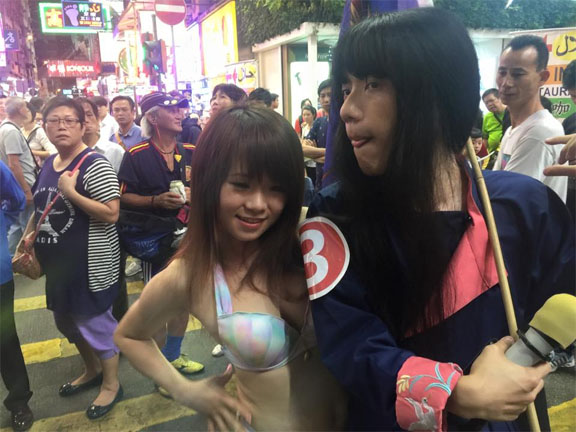
SocREC videos:
Part 1,
Part 2.
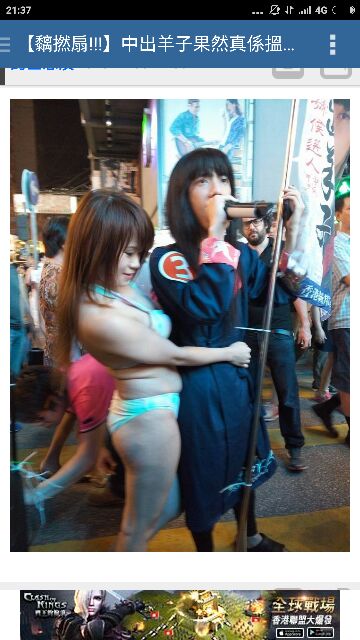
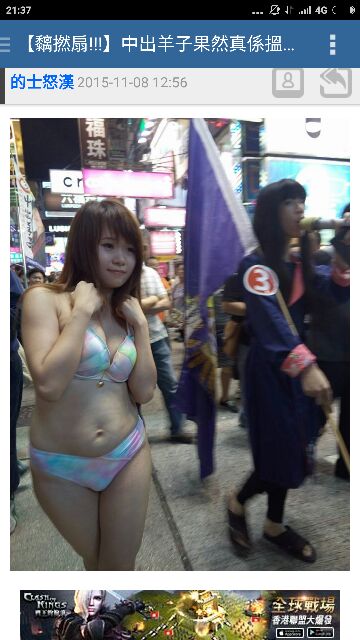

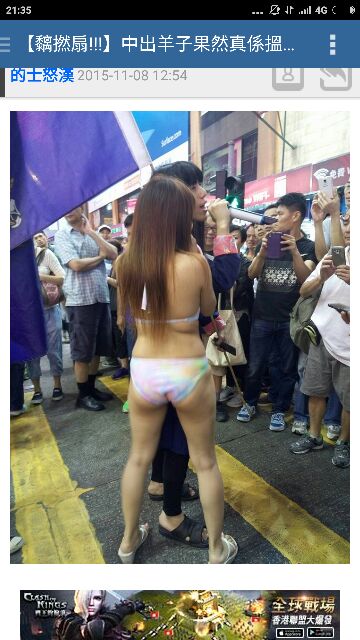
(Apple
Daily) November 23, 2015.
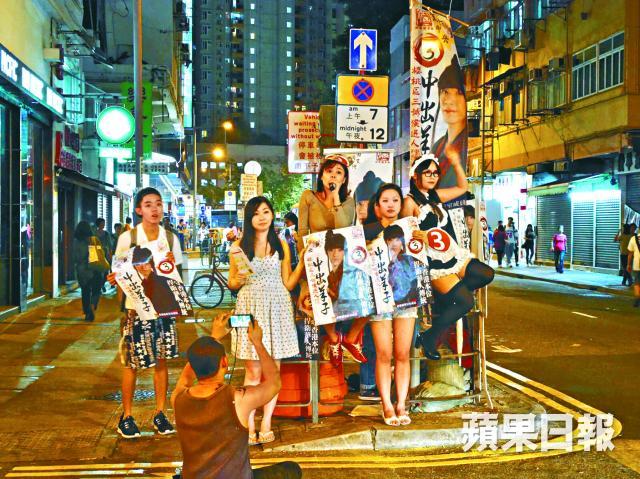
On election day, the campaign team for Nakade
Hitsujiko was spotted wearing maid costumes and ancient Chinese dresses.
However, they said that they have no idea where Nakade Hitsujiko himself
was. Early that morning, Nakade Hitsujiko had posted on Facebook about being
disappointed with the response to his call for a large turnout. He said that
he did his best in this election. For months, he did the work of several
people and slept for only a few hours a day. During November, he has managed
to catch only a few episodes of the his favorite Japanese manga One Punch
Superman and exactly one episode of Digital Dinosaur.
A member of his campaign team
nicknamed Mong Kok 13 explained that Nakade Hitsujiko was merely being
emotional. Mong Kok 13 said that this district council election is an occasion
to build up the image of Nakade Hitsujiko and not for any policy platform.
Mong Kok 13 said that Nakade Hitsujiko is going to win even if he campaigns in
a sleep.
(Hong
Kong Free Press) November 25, 2015.
Lurking somewhere at the bottom
of the copious election coverage was a little phrase which caught my
attention, and should perhaps have caught more from other people. Nakade
Hitsujiko, a candidate in Tai Kok Tsui, wished to have on his election
material, which is printed and distributed free by the Registration and
Electoral Office, the slogan: ôbuild Hong Kong city stateö. The slogan was
removed by the REO. Mr Hitsujiko, who changed his name from Chung Ming-lun
before the election, was what we press scribes tactfully refer to as a
ôcolourfulö candidate, occupying a point somewhere on the spectrum between
Martin Bell and Screaming Lord Sutch. That is no reason for depriving him of
the rights enjoyed by other candidates, and the question which arises is: by
what right does the REO censor candidatesÆ election material?
The REOÆs view, reportedly, was that the
slogan ôviolated the Basic Lawö, and in particular that part of it which
states that Hong Kong is an inalienable part of the PeopleÆs Paradise. I
have several problems with this. The first is that the Basic Law, along with
the bits about inalienable membership of the motherland, also states that
citizens of the SAR have freedom of speech. What that means in most
jurisdictions is that people are free to argue peacefully for changes to the
constitutional arrangements, however fundamental they may seem to be.
Citizens of Texas are free to agitate for secession from the Union, citizens
of the UK are free to call for the abolition of the monarchy, and so on. The
Basic Law does not state that no citizen may utter any phrase or publish any
slogan which is inconsistent with the Basic Law itself. What is not
forbidden should be allowed, in our system.
Another way of looking at it is to visit
briefly that platitude which states that freedom of speech is not total. It
may be restricted in pursuit of other important purposes. These are
enumerated in the UN Declaration of Human Rights and the Hong Kong Bill of
Rights Ordinance, and concern things like the protection of reputation, the
right to a fair trial, public order and national security. Clearly the only
one which can arise in this context is the last, and I do not see how anyone
could argue with a straight face that ChinaÆs safety is threatened if the
phrase ôHong Kong city stateö finds its way onto a District Council election
leaflet. After all, Hong KongÆs status is not a matter which is going to
come up in District Board meetings anyway. Mentioning it serves the useful
purpose of giving electors a clearer idea of the thoughts and character of
the person soliciting their votes. I realise that quite a lot of candidates
do not wish the electorate to know too much about them, supposing that their
cuddles with Communism might be an electoral liability. But it is no part of
the REOÆs job to make this compulsory.
It should also be borne in mind that the
slogan ôbuild Hong Kong city stateö does not necessarily imply secession
from China. It is common in federal systems to have states which are still
part of the country. California and Bavaria are examples. A city state does
not have to be like Singapore, with its own flag, anthem, army and UN seat.
There are other models. Something like the old ôImperial Citiesö in the Holy
Roman Empire might suit, for example: the possession of a charter securing
rights to self-government in some areas and a direct allegiance to the
emperor rather than his regional representatives. Someone who hankers after
a Hong Kong city state might yearn for independence. Or he might yearn for
that high degree of autonomy in everything except defence and foreign policy
which at one time we were told we were going to get.
In fact, at some risk of violating the
Basic Law, at least in some peopleÆs view, we might go further and say that
all the large successful countries in the world have federal systems of one
kind or another and it would be greatly to ChinaÆs benefit if its political
culture was encouraged in that direction. All the countries to which one
might wish to emigrate are either small or federal or (Switzerland) both.
Looking at the 5,000 years of ChinaÆs history we must suspect that, under
the smooth surface of official history, the years of disorder and multiple
centres of power were times of dynamism and innovation, and those in which
power was precariously held in the centre saw stagnation and stasis,
culminating eventually in a successful foreign invasion. The repression
required to suppress dissent inevitably also suppresses innovation and
creativity.
Still, these larger
considerations have very little to do with the question before us, which is
whether the REO, finding a reference to ôHong Kong city Stateö in an election
leaflet, has a right to remove it. Clearly it does not. We may concede some
right to object to matter which is obscene, blasphemous or defamatory. But an
election is an exercise in free choice and that choice should be as unfettered
as possible. Also there is no legal right for the REO to interfere in this
way. The despair-inducing thing about all this is that the REOÆs record in
defence of electoral honesty in other matters û like voter registration û is
abysmal. And what is the point of putting a retired judge in charge of these
things if they are just going to make up the rules as they go along.
(Hong
Kong Free Press) November 26, 2015.
A defeated localist candidate in the
district council election was arrested on Wednesday over alleged money
laundering amounting to HK$2.17 million. Nakade Hitsujiko, an IT specialist
who changed his name from Chung Ming-lun before the election, was arrested
at his home at Kwong Lam Court in Shatin by officers from the Tai Po
district investigation team, at around 6:12am Wednesday.
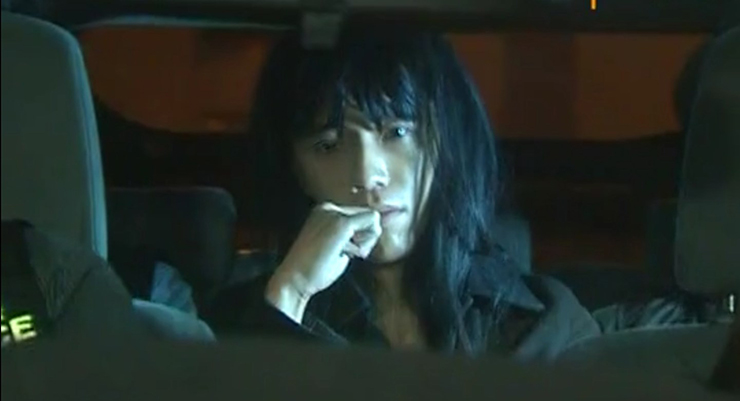 |
|
Nakade Hitsujiko in a police car
The
police told Stand News that they received a call from an employee of a
mainland company on January 16, claiming that it had received a suspected
bogus email asking the firm to transfer money to two bank accounts in Hong
Kong. The company transferred HK$2.17 million, and reported it to the
police.
Nakade was arrested after a police
investigation showed that he owned one of the accounts. He was held
overnight and a computer was seized. On November 4, the police arrested
another man in Sheung Shui for alleged money laundering û a 47-year-old man
surnamed Lam. Police said he had opened one of the two accounts. He was
released on bail and has to report back to police in early December.
Nakade lost in the Cherry constituency in
Yau Tsim Mong district on Sunday, he secured 172 votes. Independent
candidate Chung Chak-fai won by 1,611 votes, and the other candidate Lam Ho-yeung
of the Democratic Party got 858 votes.
He is a follower of Wan Chin, an assistant
professor at the Department of Chinese of Lingnan University. Chin authored
the book ôHong Kong as a City-State.ö During the election, Nakade included
phrases in his platform such as ôNation Building for Hong Kong City-Stateö,
ôNeighbouring economic heavyweightö and ôPromote Hong KongÆs sovereignty to
foreignersö. The Registration and Electoral Office (REO) rejected his
election mailings, saying the phrases were against the Basic Law û he was
required to remove them. Nakade submitted a censored version to the REO, but
he said the mailings were never delivered.
In November last year, during the
pro-democracy Occupy protests, Nakade was arrested at a residential unit in
Tai Kok Tsui for possessing weapons, where three modified air guns, dozens
of wooden shields and production materials were seized. In 2012, Nakade was
also arrested for allegedly hacking a government website for ten seconds. He
was then released.
(Ta
Kung Pao) November 27, 2015.
According to information, Nakade Hitsujiko
was not very cooperative with the police. He was allowed to post bail while
the police sought the opinion of the Department of Justice on prosecution.
According to information, Nakade Hitsujiko was the person who set up the
bank account to which some of the money ($1.55 million out of the total of
$2.17 million) was transferred. So far, $1 million of that money had been
withdrawn. Eventually, the police need to determine the identity of the
person who sent that email to see if it was Nakade Hitsujiko or someone
else.
(Hong
Kong Free Press) August 8, 2016.
Hong Kong independence advocate Nakade
Hitsujiko û whose surname is slang for ejaculating ôinsideö in Japanese û
has emerged as an unlikely internet celebrity after two failed bids for
public office in the past year.
He was defeated in the 2015 District
Council elections, and was barred from standing in the upcoming Legislative
Council elections as the returning officer believed that he ôdoes not uphold
and does not intend to uphold the Basic Law.ö
Originally named Chung Ming-lun, the
24-year-old IT specialist legally changed his name to Nakade last year. He
initially became known among Hong KongÆs online community for his activism
concerning the Tiananmen Square Massacre. For a time, he was also a member
of pro-democracy political party People Power. Later, he became associated
with Lingnan University professor Chin Wan, who is considered as a pioneer
of the localism movement.
To most people, however, Nakade is the
ôjoke candidateö of the localism movement. His unconventional appearance,
outlandish proposals and constant stream of bondage and pornography-related
public Facebook posts have earned him a considerable following in Hong Kong.
Here are the top five most memorable moments of his nascent political
career.
5. His speech at the August 2016
independence rally
A veteran of two electoral campaigns,
Nakade is no stranger to the microphone and an audience. However, as one of
six pro-independence candidates who were disqualified from the upcoming
Legislative Council elections, he was given the unprecedented opportunity to
speak in front of thousands at a rally held by the Hong Kong National Party
in Tamar Park last Friday evening.
Although not a fluent orator, he rallied
supporters in a speech full of witty criticisms, comedic moments and gaffes.
Dressed in plain white royal garments, he reiterated his campaign promise to
lead 500 Hong Kong foot-soldiers to the Great Hall of the People in Beijing
and drink Tsingtao beer with Chinese President Xi Jinping. He also unveiled
his diplomatic strategy: ôto defend Hong Kong,ö he said, ôwe need to hook up
with foreign forces,ö as he unveiled a pirateÆs hook from his pocket.
ôA lot of people ask me if I am insane.
æNo,Æ I tell them, æIÆm only doing the most normal thing in insane times.Æö
4. His November 2015 arrest for
alleged money laundering
Nakade is also no stranger to the interior
of police vans. He was arrested in 2012 after allegedly performing a
cyberattack against a government website, and again during the Umbrella
Movement when police allegedly discovered wooden shields and modified air
guns in a Tai Kok Tsui apartment. However, his arrest on charges of alleged
money laundering in 2015 came as a surprise to many.
A mere three days after the November
District Council elections, Nakade was taken away by police. Responding to
queries from Stand News, the police said that a mainland Chinese company had
received a suspicious email asking the firm to transfer money to two bank
accounts. The firm transferred HK$2.17 million before reporting the matter
to the authorities, and a police investigation showed that Nakade owned one
of the accounts. The police also seized a computer from his apartment.
Internet users expressed scepticism over
the timing of NakadeÆs arrest. The Chinese company had reported the matter
to the police in January, and another man had already been arrested in
connection with the case. Nakade was released on bail after one night, and
there have seemingly been no reports of further developments since.
3. His ælocal sexy ladiesÆ at the 2015
District Council elections
What better way to evict the groups of
ôChinese singing auntiesö on Mong KokÆs Sai Yeung Choi Street, than by
mobilising Hong KongÆs ôlocal sexy ladiesö? This plan was part of NakadeÆs
campaign platform as he ran for election in the Cherry constituency of the
Yau Tsim Mong District Council last year.
Sai Yeung Choi Street South is a pedestrian
zone open to street performances on weekends. Controversially, performers
include the ôsinging aunties:ö groups of middle-aged females dancing to
Communist songs, more commonly seen in mainland Chinese cities. Nakade
accused them of ôshamelessly seducing local uncles with bad taste,ö and
ôcreating unforgettable psychological trauma for foreign tourists.ö
In the lead-up to the November District
Council elections, Nakade provided voters with a glimpse of how he planned
to counter the ôsinging auntiesö. Several bikini-clad ladies flanked him as
he campaigned around Mong Kok, handing out election flyers and attracting
crowds. But in the end, Nakade received only 172 votes.
2. His royal titles
Nakade dresses in ancient royal garments
because he is ôPrincess Chiu Ming, a member of the Hong Kong city-state
royal familyö. This title was conferred upon him by professor Chin
Wan û who is known among internet users as the ôhigh priestö of Hong Kong û
in December 2013.
NakadeÆs platform is different from that of
other pro-independence activists, in that he advocates for Hong Kong
becoming a monarchy. According to his election manifesto, the palace would
be built on Tai Mo Shan, Hong KongÆs highest peak.
As ôPrincess Chiu Ming,ö he has adopted a
pseudo-religious tone of speech, calling on supporters of Hong KongÆs
reunification with China to repent. ôThe sea is endless, but if you turn
around, you will find land. Put down your butcherÆs knives, and become
Buddha.ö
ôI am a member of the Hong Kong city-state
royal family. The honour of my subjects will be my own personal honour!ö he
declared last Friday at Tamar Park.
1. His response to the returning
officerÆs query
In an unprecedented development, candidates
for the 2016 Legislative Council elections were asked to sign a declaration
stating that they would uphold the Basic Law and pledge allegiance to the
Hong Kong Special Administrative Region (SAR). Some candidates received
further queries from their returning officer on whether they would ôcontinue
to support Hong Kong independence,ö including Nakade. He responded as
follows:
ôI have never specified in my various
proclamations that æHong KongÆ refers to the æHong Kong SARÆà æHong Kong
independenceÆ refers to the [independence of] the geographical area located
between the latitude coordinates 22░ 08Æ and 35Æ, and the longitude
coordinates 113░ 49Æ and 114░ 13Æ. This area has no clear boundaries, but is
commonly known as æHong KongÆ.ö
ô[Beijing] can cite Chang-EÆs flight to the
moon as proof that the moon has historically been an inalienable part of the
PeopleÆs Republic of China. It can shoot the æHong Kong SARÆ onto the moonà
thereby creating a political vacuum in the geographical area commonly known
as æHong KongÆà then, a state can be established.ö
He was disqualified.
Videos:
(Nextplus)
https://www.youtube.com/watch?v=ztiQHD_6NDE Interview with bikini
girl.
(SocREC)
https://www.youtube.com/watch?v=czxMmL8JKYo Campaign bikini girl on
Sai Yeung Choi Street South pedestrian mall
(SocREC)
https://www.youtube.com/watch?v=LL_uEnlyPHE Opposing opt-out organ
donation policy
(SocREC)
https://www.youtube.com/watch?v=eSU9UqfGpks Demanding the People's
Liberation Army to dispatch its forces into the South Sea.
(Hot News)
https://www.youtube.com/watch?v=6f3tdqBvF_k Campaign workers dressed
as maid wearing 3 inch heels on election day.
(Steve Leung)
https://www.youtube.com/watch?v=86uV1L7e_UY S&M show on Sai Yeung
Choi Street South pedestrian mall
Internet comments:
- The whole case of Nakade
Hitsujiko contains many details that arouse suspicions.
On October 18, 2014, Nakade Hitsujiko held up a sign that says: "12 o'clock
-- recover the cross road." Shortly after midnight at the intersection of
Nathan Road and Argyle Street, the demonstrators surged forward but the
police were well-prepared and countered with a baton charge that led to many
injuries and arrests (see
http://www.youtube.com/watch?v=UxP-C8-bCB8 ).
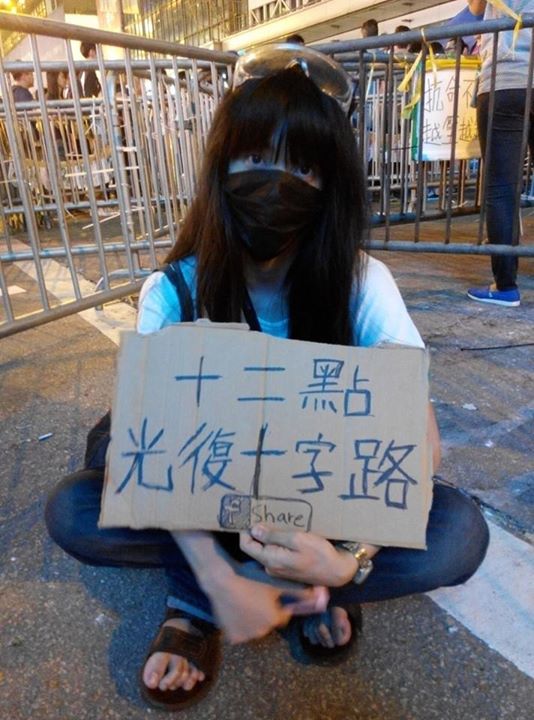
(Oriental
Daily, December 1, 2014)
The police closed in on a
weapons-manufacturing factory in Tai Kok Tsui, confiscating 32 wooden shields
and 3 modified pellet guns. The police arrested four men and one woman at the
apartment unit. The principal is a 23-year-old man named Chung who likes to
cross-dress and advocates progressive Occupy actions. On October 20, he
declared on the Internet that it is time to replace the umbrella with the
shield. In response to his call, more than 10 donors gave him more than
HK$30,000 to start the "Democratic Foxconn factory" at his 400-square-feet Tai
Kok Tsui apartment unit. He used the money to purchase electric drills, wooden
boards, screws, plastic pipes and other parts from hardware stores. He and his
cohorts worked day and night to manufacture the shields. Those shields were
brought to Mong Kok and handed out to demonstrators. He said that Internet
users can set up their own factories, wherein a five-person team can
manufacture a shield every five minutes. Thus, it would be trivial to
manufacture a thousand shields. As the police took him away, Chung shouted:
"Go Mong Kok, go Admiralty, the Revolution shall be victorious, the City
State shall win and return."
However, Chung (who later
changed his name to Nakade Hitsujiko) was released without being charged.
And now Nakade Hitsujiko is
arrested the week after the district council elections for money
laundering activities that occurred in January this year. And the
co-conspirator Lam was arrested on November 4, more than two weeks ago. That means the police waited
until after the district council elections before arresting him.
All these signs lead to an inevitable
conclusion: Nakade Hitsujiko is working with/for the Hong Kong Police.
- Interesting that none of his cohorts (such
as Wan Chin) dare to voice support for Nakade Hitsujiko in this matter. No
talk about political suppression. No call to surround the police
station and demand his immediate release.
- Wan Chin is saying that the only thing he ever told Nakade Hitsujiko is
that "politics is entertainment" and then Nakade Hitsujiko did everything
else on his own.
- Matthew 27:24: When Pilate saw that he was accomplishing nothing, but
rather that a riot was starting, he took water and washed his hands in front
of the crowd, saying, "I am innocent of this Man's blood; see to that
yourselves." And all the people said, "His blood shall be on us and on our
children!"
- On Internet
radio, the talk is basically centered about what we know about Nakade
Hitsujiko before.
In reality, we know nothing about the current case. There is no information,
and there are no answers to any of the questions.
Another way to put this, we despised him before and therefore we gloat about
his arrest now.
Although crazy acts should be appreciated, when those crazy acts interfere
with people who are trying to be more constructive, then this is
destructive. My general advice in such cases is not to follow the preceding
car too closely, or else you may get caught in an accident.
-
CAP 455 Organized and Serious Crime Ordinance
Section 25 Dealing with property known or believed to
represent proceeds of indictable offence
(1) Subject to section 25A, a person commits an offence
if, knowing or having reasonable grounds to believe that any property in
whole or in part directly or indirectly represents any person's proceeds
of an indictable offence, he deals with that property.
(2) In proceedings against a person for an offence under
subsection (1), it is a defence to prove that-
(a) he intended to disclose to an authorized officer
such knowledge, suspicion or matter as is mentioned in section 25A(1) in
relation to the act in contravention of subsection (1) concerned; and
(b) there is reasonable excuse for his failure to make
disclosure in accordance with section 25A(2).
(3) A person who commits an offence under subsection (1)
is liable-
(a) on conviction upon indictment to a fine of $5000000
and to imprisonment for 14 years; or
(b) on summary conviction to a fine of $500000 and to imprisonment
for 3 years.
In his defense, Nakade Hitsujiko
would have to plead stupidity as the reason for his failure to make
disclosure.
- Spoof poster
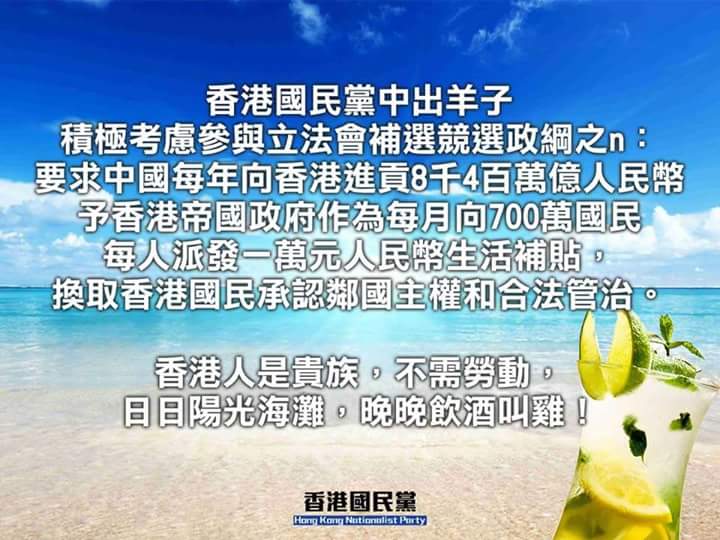
Nakade Hitsujiko of the Hong Kong Nationalist Party
is actively considering participating in the Hong Kong Legislative Council
by-election
Policy platform item:
Demand China pay $840 billion RMB to Hong Kong each year
to be distributed among the population of 7 million in Hong Kong
so that each one will receive $10,000 RMB per month as living subsidy
in return for the people of Hong Kong acknowledging the sovereignty and
governance of their neighboring country
The people of Hong Kong are nobles, they don't have to work
Sun and beach every day, wine and prostitutes every night.
- District Council candidates have to disclose
their campaign expenditures.

The total campaign expenditure for Nakade
Hitsujiko was $41,344.75. The bikini girl was paid $2,000 to work from 5pm to
9pm at an hourly rate of $500. However, he did not list any donations.
Previously, there were
Leaks, Leaks and More Leaks. Now there
is more.
(PTT-Gossiping)
Hong Kong University council meeting, September 29, 2015.
Audio file:
https://drive.google.com/file/d/0B3MeFixiJhdyUGpoRlZoRnNtUFU/view
Transcript:
https://drive.google.com/file/d/0B3MeFixiJhdyMEQzRGtEbjllbkE/view?usp=sh
KK Wong: Thank you chairman. I
think Professor Kwok has a point but I think academic freedomà I think here is
the Council meeting on this particular issue is not the main point of concern
because we are talking about is the recruitment of human resources matter.
Whether or not we are appointing a person does not relate to academic freedom.
I think we all respect academic freedom very well. And as our President said
in the opening and remarks, right now we are really in a dilemmaà: approve it,
disapprove it or delay it. Every single option will have a down side. I think
we have to make a choice.
After reading the papers which is the first time I have ever heard of this
paper, then I officially looked at the name of the candidate although I have
heard about the name in the press for a long time. I do feel that we have to
be very cautious in this appointment because, as some of our colleagues
mentioned earlier, we have to really unite--I am talking about HKU only, not
Hong Kong. We have to unite, trying to develop a strategy under the
instruction of President to really foster and assure academic freedom,
academic excellence and also smooth human relation. I think we have been
divided too much. We need somebody to really hold us together, our chairman,
our President and all our senior management team. So, on balance, without
referring to particular issues, I really think that thereÆre controversies
surrounding the candidate. So maybe it needs more cautious step to appoint a
person in this post as soon as possible, but I will not support the
nomination at this point.
Martin Liao: à I have made some enquiries
amongst the senior academics both in this University and other
universitiesàit is more or less the same thing. I did look into the
publications for the past five years myself, and also nothing as detailed
and as comprehensive as EdwardÆs research. Perhaps just to supplement on
what Edward said, I have looked into the past five years, and I was looking
for citations of academic work that from the candidate, and there was none,
except there was googled four times, googledà researchà I mean it was google
searchedà it was google searched four times, and there was no citation.
Thank you.
CM Lo: My
position in the Council is somewhat similar to KY. We are both academic
staff elected by staff members. I fully understand that we are here at our
full capacity. I am not representing the staff but I do have the perspective
from the staff members. So in terms of the academic qualifications, I can
make some comments and in terms of how I see him as the potential candidate
for PVC staffing, remember this is related to academic staffing and
resources. So thatÆs why I feel that I can give my opinion and thoughts
about the appointment.
Firstly it is on academic achievement. Secondly, as a staff, whether I see
him as a suitable person to take care of staffing and resources because
there have very important implications for us, for the staff. I am a new
member of the
council and I was elected in May, so I have been in the Council this is the
forth one. When I decided to accept the nomination, I really donÆt have this
item on my agenda, I am a bit regret now as if you look at the attack
against Johannes Chan, I would say that my suffer in the last couple of
months is a result in the participation in this Council, is perhaps even
more than one. He has the right to complain about. I donÆt know what I
should do. I was fulfilling my duty as a University staff elected
representative to take part in this council meeting and every time I remind
myself this is my duty to do this for the best interest of the University.
But when I fell, all these people, I am not
saying only the students, I know there are people outside the University,
there is no doubt that the student lead the crowd in and I have this
meeting. I have been teased in so many articles, so many pictures to say
that I am an actor, that I took a dive, alright. I really feel very bad, I
didnÆt complain eventually and even when I was in the hospital and I talked
to the media with my occupation in charge that I will kindly accept, I won't
hold the students accountable. ThatÆs my true belief because I feel very sad
if those people in the room and outside were our students, I really feel
ashamed. We have not done our duty well.
I always remind myself that what I read in the
newspaper cannot be taken as the truth and I always say and tell other
people that I donÆt know the candidate, until I saw it on the table in this
meeting. I was asked, before this meeting, in the last honorary fellowship
conference. All these media come to me asking, would you accept this JC be
received as the next PVC and I said come on, how can you ask me to make a
conclusion before I actually conducted a study as an academic, we should not
make conclusion before we looked at the facts. The facts are here and the
facts are also from all the discussions we had. I really appreciated all the
members and I truly believe everyone here is an independent trustee of the
University, hoping for the best interest of the University. I appreciate all
the thoughts and I now saying what I think base on all these facts, what is
my opinion.
Now, first
of all I have to declare my conflict of interest, I know JC. He was in the
same hostel with me in St. JohnÆs College so we live next to another floor.
We know each other and in some of the previous University activities he has
expressed support for me and for my department. So I really appreciate his
support for me and in fact when I heard about his nomination in the media,
that he is the candidate... and in the personal point of view that he is a
good guy as many of the members have said. He is a good man. He has been
working for the University for so long. This is the first impression for me
that I should support him.
After looking at this and especially after the
incident in July, I have some reservation. It is about his qualification.
Professor Chan has a very detailed analysis on the publication. You can look
at it, for the last 15 years, he has produced less than 5 items output
including factor and article, less than 5 a year and in some years for
example, in 2008, he has produced only 1 item, 2011, 1 item only. I know the
number, quantity, is not the absolute measure, you have to see the quality
as well.
If I have an
assistant professor with this kind of output, I will be very concerned
about, I would really say, hey, how can you reach the bar of the notion with
in the university, very strict criteria 4 + 4 for practical, 3 + 3 for
non-practical, for promotion either up or out from an assistant professor to
an associate professor. And if my assistant professor give me a CV which is
1 output per year, I would say, you are in trouble. In 6 years or in 8 years
time, how many publications did you have in your CV, you canÆt reach that
bar. I agree with KY that the University, the USBC, he is not a case to
promotion and I doubt whether the same applies to the Law faculty. I
believe it should, you still have to same sort of criteria.
Professor Chan is actually the best person
here as an academic. So I would like to start a question whether he has the
academic qualifications to take up this position especially he will be
looking at staffing, looking at promotion and if you are not a Phd yourself
how can you supervise people. The same as if you are not academically of
certain standing. How can you say, hey, you are not well presented. The
candidate would really say, look at your CV, your CV is not as good as mine.
How can you turn down an application, if you donÆt have the kind of quality?
So this is my feeling when I saw this CV and
reminded me of quality and whether he is qualified as a PVC. Perhaps the VC
may not be aware of this but certainly I think after this point was
mentioned, I hope as the search committee chairman, you would consider
whether, you know, you said just now you were not aware of this and you take
it for granted since he has been promoted to a professor and since he is
appointed as a dean, he must qualify. I donÆt feel that should be some
trivial correlation
PM:
ààthere were 4 academic members on the search committee. I was qualified to
make academic judgments. I have a lot of experience of making these
judgments. There were 3 other academic members of the committee. So there
were 4 ppl, 3 of them are not here to represent their views, so my job as a
chairman is to represent their views. Academic credentials were considered,
and were considered suitable. Council members may disagree. But I am not
going to go back from the judgement made by the search committee.
As to a comment to the number of papers he
published, I think itÆs utterly irrelevant. ThereÆs no job description that
says you could have published certain number of papers or youÆre not
qualified for this role. Theà number of papers published that not enough
quality and you canÆt transfer from medicine into law because the
publication requirement is different. So frankly the number of paper he
published in the last 15 years (à)
CM Lo: Well thatÆs the qualification partà my
feeling about reading his CV...the second part is related to whether he's
suitable for this position, because he's going to take care of academic
staffing. And my expectation for such person has to be very impartial. I
wouldn't have problem with political approval, alright? You can apply to
youràpolitical meeting or whatever. I do have many staffs who take part in
occupy central. They are so yellow, and I've expressed my position and my
opinion that I did not support occupy central. I don't have a problem in the
hospital. Because they work in hospital, political opinion does not affect
their clinical service, and never change their duty just because they
support occupy central. That should not affect your work in the university
and the hospital.
But on
that event, on that night that we have been in the storm of council meeting
and subsequently my injury. And after the event, I really didn't see him
showing any sympathy for the council members, and particularà I...myselfà. I
am a staff elected by the all the other staff to take part, and I sustained
and injured. From all the opinion that he has expressed, actually he's still
putting the blame on the council, he has never, I'm not saying I need his
sympathy. But as a staff, I really feel if you are PVC (staffing) and if a
staff member had an injury during an event like this, should you just keep
on saying it's the council's fault. That means it's my fault as well? So in
a way he's telling the public, he's speaking out in public, including his
Letter to Hong Kong, that the fault remains in the council...in a wayàfor
the suffering I encountered. That is my concern, and as I said before, I
came to this meeting when I know heÆs a potential candidate. I am very
supportive initially, but with this and now looking his CV and what happened
and his way of handling it... I really need to think twice before
considering him as a suitable person for this position, and I wonder, I know
the recommendation by the search committee was actually made a while ago,
was actually written in July... With that kind of incidents and the way that
this candidate has expressed his opinion in public, would the search
committee still consider that kind of person is suitable to handle academic
staffing and resource? Because as a staff, I am seriously concerned, even
though I know I am here not representing the staff.
CH: The recommendation of search committee was
made in July (...) sorry in May. So anything after that was not included.
CM Lo: à If that is the case. Can I ask the
chairman of the search committee, would you take into account of what
happened afterwards, that this candidate has done this (VC: done what?),
openly breached the confidentiality calling himself a candidate, and then
was complaining that the council has not doing the right thing? and despite
the fact that there are council members including the staff member who
suffer injury during that event, he has expressed no concern whatsoever, to
the safety of the council and staff members.
And in contrast, he put the blame on the
council members and including me as a staff member. I am really terrified
that someone with this kind of... I don't want to extrapolate but I felt the
threat is someone ... i would say he's putting his political intonation into
the university. Because at a ... political opinion he may think that I am
here to represent CY. I can tell you I am not a Leung fan. I came in with
support of the staff members. I've never talked to CY. CY has never talked
to me about this. But it seems that everybody there including Johannes Chan
has labelled. Whatever I suffer, I deserve it.
PM: So my comment on that is I think youÆve
taken things very personally, and I think we should keep things to factual
discussion, and the purpose of the candidate. ThereÆs no requirement in the
job description for the candidate to express sympathy otherwise on anybody
who is injured. I think you are putting post-event facts into this
particular context, so the à I canÆt speak for the Search Committee, Search
Committee hasnÆt met since 27 May, I can only speak as a Council Member, the
events that happened since the Search CommitteeÆs paper was written on 27
May, there have been many things written and said, a lot of opinions, I
prefer to stick to the facts. And the facts that the Committee has to
consider were the qualification and suitability for the post. IÆve already
said at the start of the meeting that itÆs my view that whilst none of the
outcomes are attractive, to my mind, there will be less damage done for the
University by the acceptance of the nomination ...
(Hong
Kong Free Press) November 26, 2015.
Another recording of speeches made by Council
members of the University of Hong Kong (HKU) has been leaked on a popular
Taiwanese internet forum. The
transcript and
recording of an HKU Council meeting was uploaded the PTT forum at around
6pm on Thursday. The speeches were apparently made during an August 25
meeting, the one after the July 28 meeting in which students charged into
the meeting room. The students were protesting the CouncilÆs indecision over
whether to appoint liberal law scholar Johannes Chan Man-mun as HKUÆs
pro-vice-chancellor.
Steven J. Cannon: à WeÆve got photographic
evidence that backs a lot of this up, weÆve reviewed the videosà uhà there
are a whole series of disturbing scenesà uhà we have been looking at what
legal options might be available to us. Uhà
Arthur Li Can I just ask is it possible from
your system that we can identify the students involved?
Steven J. Cannon: Certainly we can identify
individualsà we can identify the presence of individuals. ItÆs what those
individuals were doing. We believe that the number of potential offenses,
disorder in public places, unlawful assembly, assault, false imprisonment,
and nuisance committed in public places were all areas that if we chose
collectively or individuals chose to pursue à that would beàà
Arthur Li: So you have evidenceà
Steven J. Cannon: à we could gather evidence
around that and we would look to do that. But at the moment we are notà we
havenÆt sought to do that. We are looking, really to getà sound, the
àexperiencesà but we do have written evidence from our people. We have video
and photographic evidence. We have video evidence.
Chairman: Leonie?
Leonie Ki: OK. IÆd like to bringà uh chairman,
IÆd like to bring the situation to inform the council meeting of this on
July the 28th, because I heard and it was possibly reported in the newspaper
on the 27 or the 26 of July, that the student union chairman of HKU has
announced that, if our reà, their request was not mentioned, they would
barge into the senate room.
So thatÆs why I tried talk to Dr. Chau, Dr.
Albert Chau, and I said we should not let the students come into the senate
room because it is really a sacred place for Hong Kong U, and besides, I
also sent you this email that the safety and dignity of the council members
should be guaranteed as well as the image of the university.
But then Albert told me not to worry, because
our students are very obedient, very good. And I keep reminding him of the
incidents on 818 and 812, is, uh, the reverse, you know, because we also
have other students from other universities.
Having said that, uh, it is, uh, because Ià my
request is, because they already warned us of barging into the senate, I
wonder why we still let them come into the 10th floor, because, they already
give us a warning, we should not allow them to come onto the 10th floor. And
I think that we, instead of coming here, we should be still having our
meeting over there, instead of trying to be scared, because what we should
do is warned the students or whatever downstairs.
And I also heard later on, that from the
pan-democrats, they said that 13 people, the alumni, the Legco, they too
have an agreement toà stay downstairs, whereasà students go upstairs. So
then, itÆs so chaotic because it is really like what Steve has reported, is
organized and is also orchestrated. And I think we should be protected
because we already heard of this alert, and we should take warning, you
know.
Chairman: Steve, I would answer several
questions after you tell us why students barged àup to the 10th floor?
Steven J. Cannon: We were following
essentially theà 818 guidance and protocols that have been establishedà and
there have been several protocols, I agree that there had been a threat to
enter the council. (Leonie Ki: itÆs a threat announcedà) There had been
several protests on, several council meetings running up to, to where we
have quite a significant number of people on the 10th floor.
I think that we had a strong sense that the
students would enter the council chamber. I think what we expected we also
had a strong sense that would happen at the end, towards the end of the
meeting after the vote on a particularàuh, uh, item was taken. But the view
was that they would enter in a reasonable manner and that the chairman would
adjourn the meeting and general meeting (Chairman: if they donÆt leave) if
they donÆt leave, we would appeal to them to leave, and the chairman would
adjourn the meeting and then there would be an element of calm. What we
didnÆt expect was the level of verbal abuse and physical abuse that took
place and thatÆs what we hadnÆ t anticipated.
And that suggests to us that we need to
revisit the original agreement if you like, which wasnÆt an agreement, the
original protocol with our students about allowing zone demonstration areas,
about close access to the council members which came out of the 818
incident.
Chairman: I don't mean to interveneà this
moment, first of all, we are now facing three problems, first of all is
improving our so called security safety forà visit the council meetings.
Going back to a more decent meeting place, as I mentioned at the start, this
isà a makeshift issue, this university à a decent meeting place, for
council, senate, and Court à EVPà service unità in this week, to seek out of
a possible way to have a more decent meeting.
One of the things that I am suggesting, is
that, still à council, uh, senate chamber, but we want to make sure that
thereÆs another door that members can leave should the only existing door be
barricaded and somebody toss a firebomb or something on itàà. IÆm very, very
strong that ... defend à we need a proper meeting place and not just a
makeshift thing.
Point number two is that the whole movement
was based on the protocol decided onà obviouslyà said that needs to be
changed as a result of this one incident. The reason that is safety and
security inà to come. I want to bring up two points. One is that there are
evidence and we have actually received complaints that students eventually
involved in barging into the senate chamberà students while down in the car
park, etc. or othersà people from outsideà central or otherà from both sideà
there was a lot of controversies. Now weÆve identified students thatàand
take actionsà would be an issue perhaps the Vice Chancellorà acceptà
Arthur Li: That would be against one studentà
Chairman: Because by protocolà
Arthur Li: There still one studentà
Chairman: This is , this is just the starting
point à somebody complained one studentà
Arthur Li: I mean, I mean, I meanàI donÆt know
the name of the studentà
Chairman: I would, I would adviseà
Arthur Li: May I, may I, may I suggest this,
chairman, let this be passed to the meetingà, to identify the students
involved to face disciplinary actions, has to report back to the council(?)à
for more actionsà (Chairman: à accepting reportingà to see if we agree with
the actions or notàbecause I Æm à giving a very clear messageà Ià If we do
not do it properly, any council member can take civil actions against the
students, against this council, OK?
Because you are not protecting the council
membersà
Chairman: That is what I amà
Arthur Li: I can take civil actions against
University of Hong Kong. I can take criminal actions against the students
but I can alsoàà
Chairman: I am not disagreeingà What IÆm
saying is thatà There is already a receipt of one complaint ofà
Arthur Li: Yeah I donÆt want toà
Chairman:àone beginningà
Arthur Li: Yeah but itÆs not fair to single
out one studentàà
Chairman: Next thingàwould beà all over the
facebookà identify others
Arthur Li: Have we accepted.. theàreport?
Chairman: Yes
Arthur Li:àand then askà to deal with the
consequences thereofà
Chairman: Oh thatÆs basically what it is.
Steven J. Cannon: The issue is yet between
student discipline and general public offence, if you like. The student
discipline under the ordinance of statute that students dedicatedà a
complaint has to be raised within twenty-eight days of an incident, and it
has to be specificà and we have had one complaint and that goes to the
Vice-Chancellor, and then....
Internet comments:
- After that September 29
council meeting, HKU Student Union president Billy Fung Jing-an held a press
conference in which he divulged that "Lo Chung-mau was bitter that Johannes
Chan did not show sympathy to him when he got injured in the Council
meeting in July. Lo also said that Chan's academic accomplishments are
worse than assistant professors." That's all Fung had to say. Now that we
have an audio recording, you can decide whether this is a fair summary of what
Lo Chung-mau said;
But on that event, on that night
that we have been in the storm of council meeting and subsequently my injury.
And after the event, I really didn't see him showing any sympathy for the
council members, and particularà I...myselfà. I am a staff elected by the all
the other staff to take part, and I sustained and injured. From all the
opinion that he has expressed, actually he's still putting the blame on the
council, he has never, I'm not saying I need his sympathy. But as a staff, I
really feel if you are PVC (staffing) and if a staff member had an injury
during an event like this, should you just keep on saying it's the council's
fault. That means it's my fault as well? So in a way he's telling the public,
he's speaking out in public, including his Letter to Hong Kong, that the fault
remains in the council...in a wayàfor the suffering I encountered.
Here is Fung's summary of what
Martin Liao said:
Martin Liao said that Google showed that Johannes Chan's academic articles have been searched for only
four times in the last five years.
- This piece of news is so
yesterday. At this point, nobody cares anymore. Whoever is leaking this now is
trying to affect what happens at the Extraordinary General Meeting of the HKU
Convocation on November 29. It won't. There was little or no media coverage
when the Leonie Ki comments were posted in Taiwan.
- However, there is still plenty of curiosity
about just what Johannes Chan's supporters have to say on his behalf. So far
there is not a single leak. Isn't that strange? Did anyone give high praises
to Chan's non-existent distinguished record of publications. Did anyone
suggest that Chan must be appointed or else HKU will face the wrath of the
students and staff? Did anyone suggest that anyone who votes against
appointment will be branded as a CY Leung fan? Did anyone suggest that it is
the council has always rubber-stamped approval on all recommendations by the
selection committee and therefore it must do the same here?
- Start identifying the students who took part
in the violent clash
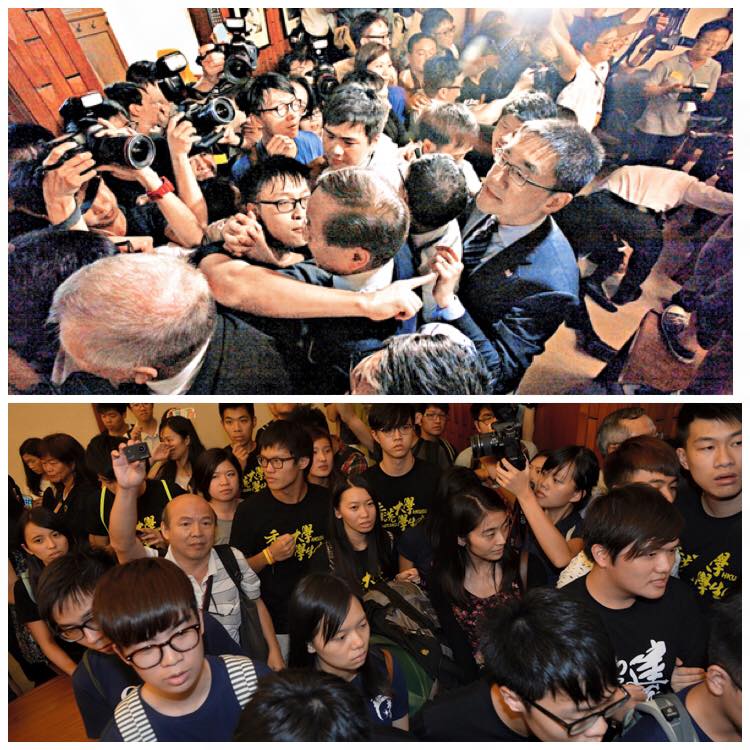
- (Speakout
HK) The latest audio recording to appear turned out to have come
from the August 25th meeting of the HKU council. The significance of this
recording is that whoever made and released the recording clearly had a plan
to do so, irrespective of what was actually said. The audio recordings were
intended to be used as tools for to advance some political agenda. Each release is
designed to precede certain events. For example, the first two recordings
showed up before the district council elections. The third and fourth
recording showed up before the Hong Kong University Convocation's
Extraordinary General Meeting to vote on certain motions. What has this got
to do with the public interest or any notion of justice?
(Oriental
Daily) November 23, 2015.
Christopher Chung Shu-kun had
been councilor for the Yue Wan district, Eastern Hong Kong since 1991. Today,
he was defeated by the independent first-time candidate Chui Chi-kin who
entered the election on the last day. Yesterday, Chung admitted to us that he
had been too complacent and ignored the newly registered voters who were
motivated by Occupy Central. Since Occupy Central, the number of registered
voters in Yue Wan district increased from 6,000+ to 8337. On election day,
there were almost 1,000 more voters compared to 2011.
(SCMP)
November 24, 2015.
Pro-Beijing veteran Christopher Chung Shu-kun
spent more than two decades representing Eastern District Council, but it
seems to have been too big a challenge for him to serve the district and the
Legislative Council at the same time.
Chung, from the Beijing-loyalist Democratic
Alliance for the Betterment and Progress of Hong Kong, was defeated on
Sunday by Chui Chi-kin - a relatively unknown candidate and so-called
"umbrella soldier". Chui chose to run only on the last day of
the nomination period, with the news shocking several DAB lawmakers,
including party chairwoman Starry Lee Wai-king.
Chung was first elected as a district
councillor in 1991. He became vice-chairman in 2003, and took the helm at
the council for about a year before stepping down when he was finally
elected to the Legislative Council in 2012 - securing 33,901 votes in his
Hong Kong Island constituency after failing in all four previous polls from
1998 to 2008. He was often ridiculed for his mistakes in
English, such as misspelling "legislative". In May last year, his English
skills came under the spotlight again as he questioned then-MTR chief
executive Jay Walder about delayed high-speed rail link to Guangzhou.
"You are being a CEO. You are very 'wearly'
[sic] passive to get the information from your staff à You are dreaming on
your office or you are not attended at your office. Answer me!" he said.
Despite a flood of criticism, Chung, who
earned a master's degree in Britain, was unrepentant. "Who can claim
themselves speaking perfect English?" he said. Before Sunday's election, Chung was again
ridiculed after his election pamphlets misspelled his name "Chirs"; he
blamed the printing firm. Chung attributed his shock loss to
first-time voters. " It was because of the political climate."
(Oriental
Daily) November 23, 2015.
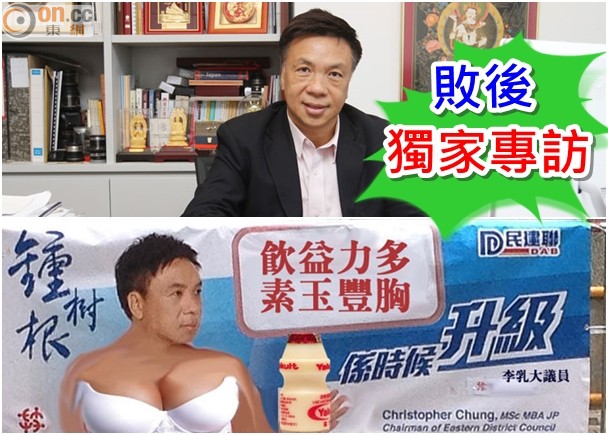
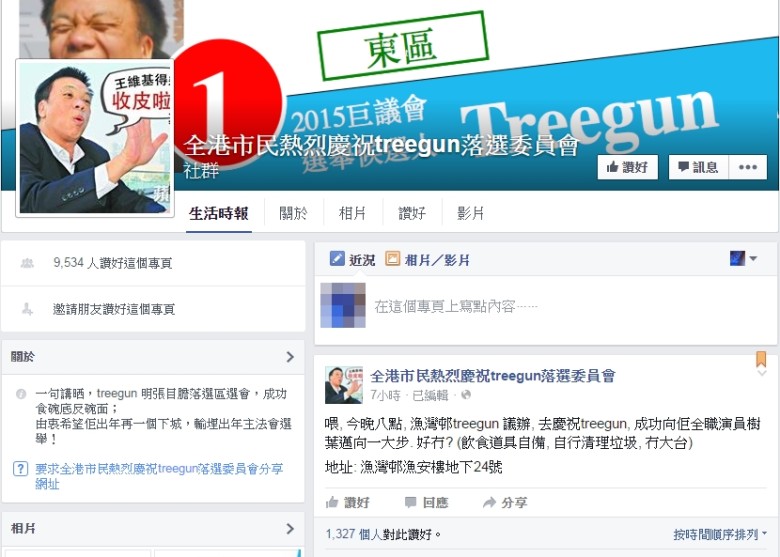
After Chris Chung's defeat, a Facebook was
created under the name: "Committee of all the people of Hong Kong
enthusiastically celebrating Treegun losing the election." People said that
Chung has been uprooted by the root. In discussing his defeat, Chung
mentioned that the Internet smears and jokes against him were another
factor.
Internet users
also challenged Chung's academic credentials. Chung said that his two
England masters degree came from accredited institutions so that there is no
question of buying diplomas. However, the candidates cannot use their
Facebook during the campaign period, so he couldn't take part in any
Facebook debate.
(SCMP)
November 24, 2015.
A newly-defeated pro-Beijing veteran
district councillor has told his critics that he will ôbe backö and seek to
regain his seat in the Eastern District Council in 2019.
Christopher Chung Shu-kan, from the
Beijing-loyalist Democratic Alliance for the Betterment and Progress of Hong
Kong, was defeated by the relatively unknown independent pan-democrat Chui
Chi-kin in Yue Wan constituency on Sunday, where he served for 24 years
since 1991. Chui was regarded as an æUmbrella soldierÆ û a candidate
inspired by the 79-day Occupy protests last year.
The outspoken pro-Beijing veteranÆs defeat
shocked his party colleagues, but about 100 supporters of his rival threw a
party outside ChungÆs district office in Yue Wan Estate in Chai Wan last
night to rub salt into his wound. They sang festive songs and opened a
bottle of champagne.
When asked about the party on a DBC radio
programme this morning, Chung said: ôI thank them for the æencouragementÆ. I
will stand up from where I fell and IÆll be back à I will continue to serve
my constituents because I represent Hong Kong Island in the Legislative
Council.ö
But political commentators raised questions
after ChungÆs defeat, suggesting the pro-Beijing camp could ask him to give
up his seat in the Legco poll next September and let someone else have a go.
Chung admitted he feel pressured to keep
his seat: ôMy partyÆs chairwoman (Starry Lee Wai-king) was right: those who
lost have to improve their work à I will seek [the partyÆs] endorsement of
my bid for re-election, so I will improve, get prepared and show that I am
more popular than other potential candidates.ö
Chung also reiterated that his defeat was
partly because young voters had come out to cast ôpolitical votesö, rather
than ôperformance votesö based on what he did in the last two decades. Chui
only decided to run at the end of the nomination period last month.
However, he appeared to have little idea
yet on how to win over young voters. ôWe will work on them à But I will try
to secure my votes first because peopleÆs work is long term, and its not
just something you can do, itÆs related to their development and school
education.ö
While ChungÆs DAB colleagues had been
relatively defensive the councillorÆs defeat, some of his pro-establishment
allies appeared more critical. Speaking separately on DBC, independent
pro-establishment lawmaker Paul Tse Wai-chung launched a veiled attack on
Chung, and said some district councillorsÆ public image could have cost them
their seats.
ôIf many things you did just made you out
to be a laughingstock, moderate voters might have negative feelings about
you,ö the newly-elected Wan Chai district councillor said. Before SundayÆs
election, Chung was ridiculed after his election pamphlets misspelled his
name ôChirsö, an error for which he blamed the printing firm.
(Oriental
Daily with video) November 23, 2014.
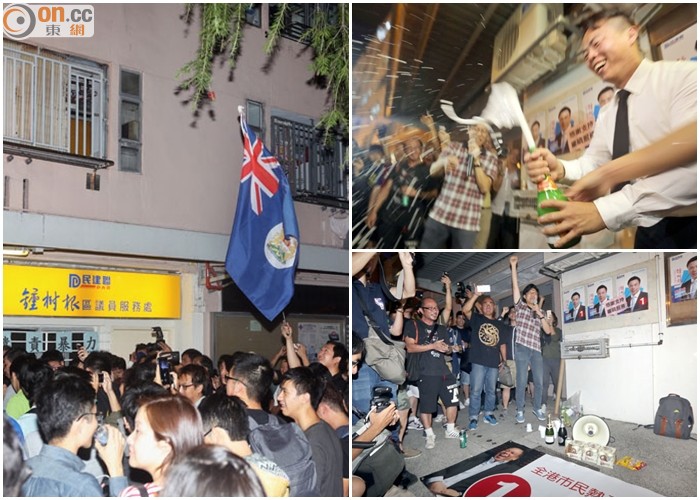
Internet users converge to Chung's office to
celebrate and wave the British Dragon-Lion drag of Hong Kong independence
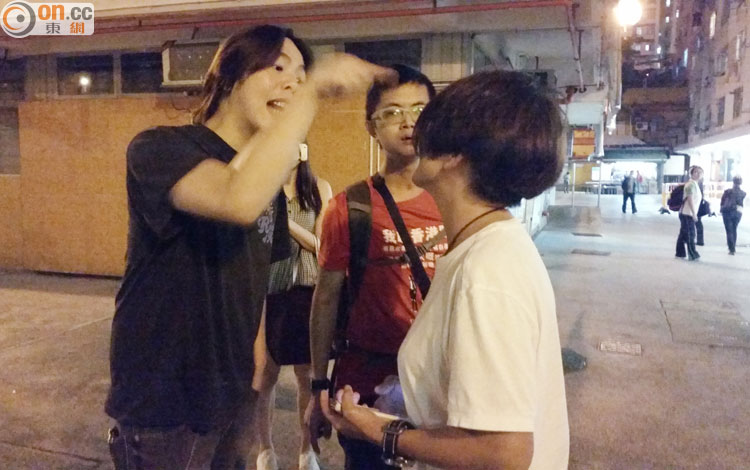
Celebrants harass a female worker in Chung's
office.
In the evening,
about 150 Internet users responded to the call on the special Facebook to
gather outside Chris Chung's office to celebrate. They played music on the
broadcast system that they brought along, they set off cherry bombs, they
waved the British Dragon-Lion flag for Hong Kong independence, they set up
an altar with Chung's photo and and burned joss sticks.
Before the main event, four to five likely
celebrants showed up outside Chung's office to take photos. A man who
claimed to be resident approached them and asked them whether they have
taken enough photos. There was a quarrel. A female worker from Chung's
office came out to film the incident with her mobile phone. The four to five
men turned their attention to the female worker and cursed her out. After
five minutes or so, the men left.
(Hong
Kong Free Press) November 24, 2015.
Dozens of local residents and activists
gathered outside outgoing district councillor Chris Chung Shu-kunæs office
on Monday night to ôcelebrateö his defeat in the latest district election.
Champagne bottles were opened, party poppers were set off and people sang a
classic joyful Cantonese tune by pop singer Paula Tsui.
Residents were happy to see Chung, who had
been representing Yuen Wan in Eastern District for more than two decades,
ousted in SundayÆs election. ôI have never seen him walk by in the past ten
years,ö a man at the rally told Apple Daily, ôhe only appears
during elections.ö
Police were called to the scene but no one
was arrested.
(Oriental
Daily with video)) November 24, 2015.
Tonight about 100 people showed up at
Elizabeth Quat's office in Ma On Shan to celebrate her defeat in the
district council election. They brought champagne and peanuts, and they sang
Paula Tsui's song. At around 8pm, someone through an egg from above and hit
celebrant Mr. Leung in the chest. Fortunately, Mr. Leung was not injured.
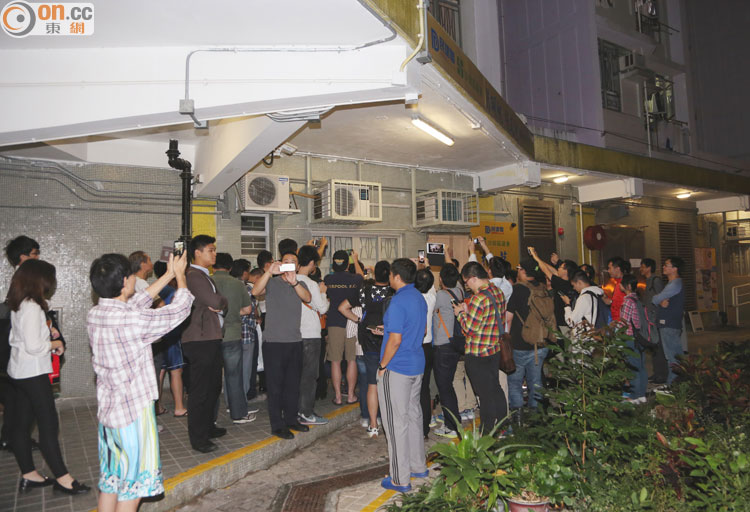
Videos:
(Oriental Daily)
https://www.youtube.com/watch?v=30imebiMl5A
(Passion Times)
https://www.youtube.com/watch?v=LIO62mci0Bo
(TMHK)
https://www.youtube.com/watch?v=rihHye2NJZ0
(Committee of all the people of
Hong Kong enthusiastically celebrating Treegun losing the election)
https://www.facebook.com/treegunloseyeahyeahyeah/videos/882727478481817/
(INT News Channel)
https://www.youtube.com/watch?v=4QsFdgeh714 At Christopher Chung's
office
(Resistance Live
Media)
https://www.youtube.com/watch?v=UJ1dIvD5Ack At Elizabeth Quat's
office.
Internet comments:
- Two can play in this game.
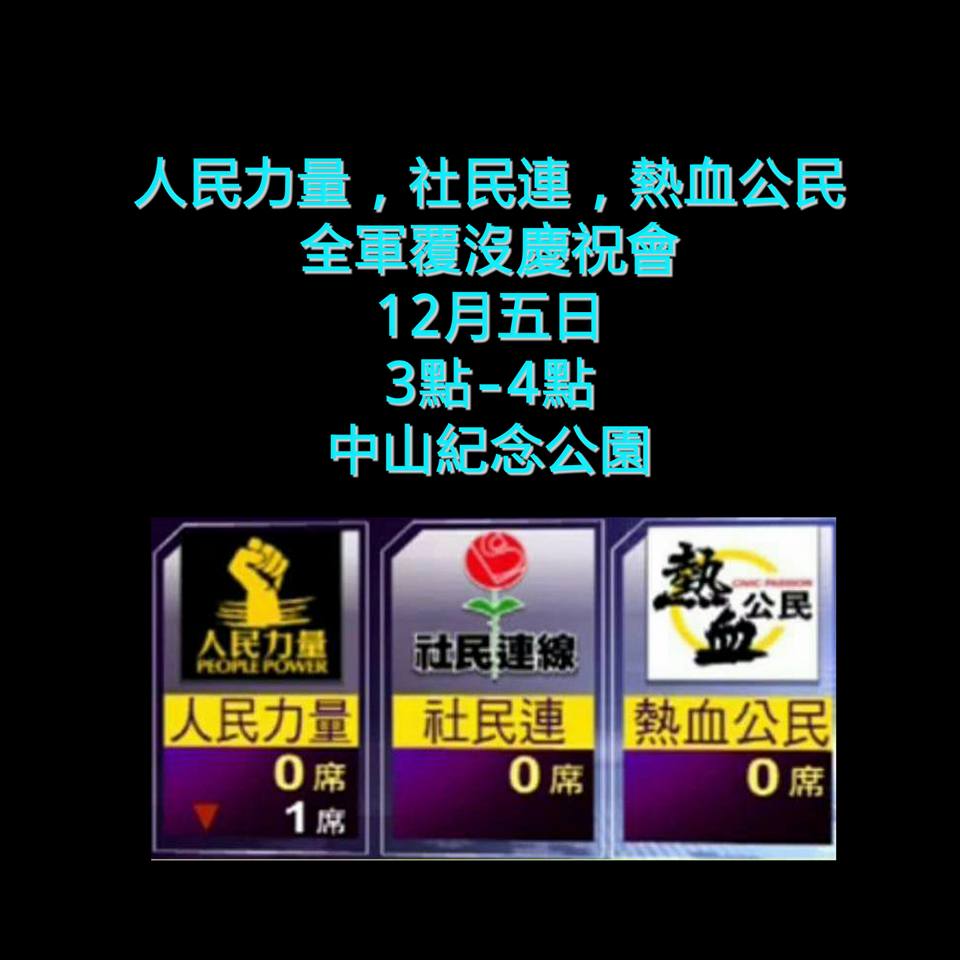
Celebration party for the total annihilation of People Power/League of
Social Democrats/Civic Passion
December 5
3pm-5pm
Su Yat Sen Memorial Park, Western Hong Kong
- Chris Chung was frequently
made fun of for misspelling English words, such as his own name as Chirs.
Here is Yao Wai-ching, the Youngspiration candidate who used to Leung Mei-fun.
She said: "Hongkongers let's win this toghether."
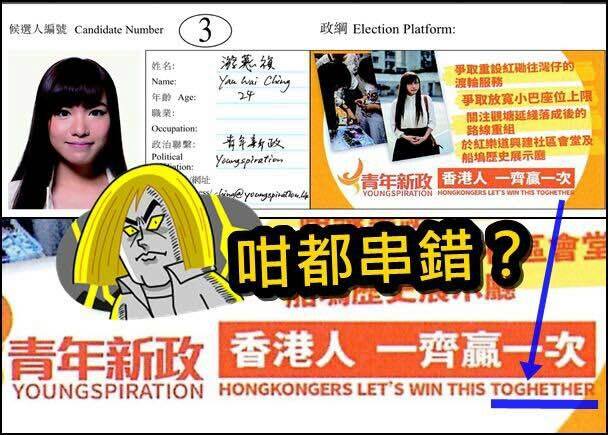
Meanwhile, Kwong Po-yin who was the sole Youngspiration candidate to win
said that she will maintain a street booth and an Internet presence in order
to actively reach out to residents. Of course, she will maintain a district
councilor's office. By the way, she is a doctor at a public hospital. It
will be interesting to see how she finds time to do everything.
- (SCMP)
Another member, Yau Wai-ching, who lost her race to lawmaker Priscilla Leung
Mei-fun by just 300 votes, said she did not highlight her participation in
the 79-day Occupy protests during the election campaign as she did not want
to be labelled an æUmbrella soldierÆ. ôI did not join the race simply
because of the Umbrella movement ... but because of unresolved deep-rooted
conflicts in Hong Kong,ö she said. ôVoters care more about your manifesto.ö
(Hong
Kong Free Press) November 23, 2015.
The pan-democrats have won 112
seats, eight of which went to ôumbrella soldiersö, while the pro-establishment
camp has taken 298 in the District Council elections on Sunday. Candidates who
were independent of political groups and parties won 13 seats.
The pan-democrats performed the best in the
Sha Tin district, where the traditional pro-democracy parties won 17 seats,
the ôumbrella soldiersö took two, and the pro-Beijing parties swept up the
rest. This means that the pan-democrats have won 50% of the seats in the
district, Apple Daily reported. However, because there is one ex officio
seat reserved for the rural committee in Sha Tin, the pan-democrats are
still one seat short of having a majority on the Council. ôUmbrella
soldiersö refers to young candidates representing parties who emerged from
the 2014 pro-democracy Occupy protests.
There was a close call in Sham
Shui Po, where the pan-democrats won 11 seats and the pro-Beijing parties won
12. In the Lai Kok constituency, Frederick Fung Kin-kee of the Association for
Democracy and PeopleÆs Livelihood (ADPL) lost by 99 votes to Chan Wing-yan of
the pro-Beijing Hong Kong Federation of Trade Unions. Eric Wong Chung-ki, who
was formerly an ADPL member and ran independently this election, only took 215
votes.
Many regarded Wong to have taken
the votes from Fung, as he divided the support of the pan-democrat voters by
running against Fung. As Wong was leaving the polling station, voters
shouted at him saying ôYouÆre a bad person, youÆve ruined everything,ö Stand
News reported. Fung had previously been a District Councillor for 12 years.
In the Kwai Tsing District, where the
pro-democracy parties had high hopes, pro-Beijing parties won 19 out of 29
of the seats, while the Democratic Party lost four of their seats. Five gave
the pro-Beijing district councillors a run for their seats but were
unsuccessful. Andrew Wan Siu-kin, Vice Chairman of the Democratic Party,
lost his seat in the Shek Yam constituency to The Democratic Alliance for
the Betterment and Progress of Hong Kong (DAB)Æs Li Sai-lung by a mere 54
votes. Lam lap-chi, Sammy Tsui Sang-hung and Leung Kwok-wah of the
Democratic Party all lost their seats to pro-Beijing candidates.
The closest call was in the Wah Fu South
constituency, where the pro-Beijing Hong Kong Island FederationÆs Au
Lap-sing won Democratic PartyÆs Li Shee-lin by just three votes. The
influence of the pro-Beijing parties was is most prominent in the Wan Chai
District, in which they won 84.6% of the seats.
(Hong
Kong Free Press) November 23, 2015.
Pro-democracy parties who exposed the lead
in water scandal have won only one seat in the five constituencies where the
major affected public housing estates are situated. The contamination issue
was first brought to light by the Democratic Party in July, after which 11
public housing estates and various schools across Hong Kong were found with
excessive lead content in their water supplies. The pro-democracy
Association for Democracy and PeopleÆs Livelihood (ADPL) also uncovered
evidence of contamination. Most of the affected public estates were built
after 2010, meaning the population in the areas could have seen certain
degree of change after the last District Council election in 2011.
The Democratic PartyÆs Ng Kim-sing beat
Leung Kar-ming of the pro-Beijing DAB party in the Hing Fong constituency,
Kwai Tsing district by 2,701 votes to 2,029. Kwai Luen Estate, one of the
estates affected by the scandal, is in the constituency.
However, the pro-Beijing camp won four
other constituencies where affected estates are located:
-
Kai Ching Estate: In Kai Tak North
constituency in Kowloon City, independent candidate Leung Yuen-ting beat
ADPLÆs Li Ting-fung by 2,610 to 932.
-
Wing Cheong Estate:
In Fu Cheong constituency in Sham Shui Po, Leung Man-kwong of Kowloon West
New Dynamic beat ADPLÆs Li Kwing by 2,973 to 2,130.
-
Choi Fook Estate:
In Jordan Valley constituency in Kwun Tong, DAB PartyÆs Ngan Man-yu beat
Democratic PartyÆs Wong Wai-tag by 2,638 to 1,400.
-
Lower Ngau Tau Kok Estate:
In the Lower Ngau Tau Kok Estate constituency in
Kwun Tong, DAB PartyÆs Cheung Yiu-pan beat Democratic PartyÆs Wong
Ching-fung by 2,441 to 1,979.
(SCMP)
Hong Kong's Occupy movement less than meets the eye. By Alex Lo. November 24,
2015.
As the old phrase goes, it's probably
better to have them inside the tent peeing out, than outside the tent peeing
in.
That's why it was a good thing there were
dozens of so-called umbrella soldiers running in the district council
elections. Unfortunately, despite the propagandising by pan-democratic media
like Apple Daily, the young lads didn't have such a great victory. Of the 50
or so troops who contested, only seven won. With a 14 per cent success rate,
it's hardly impressive.
I would have preferred to see more wins, so
that more of our young activists could start their political education by
working within the system, compromising with established pan-democratic
parties and articulating their agendas better than just shouting slogans and
occupying streets.
As it was, most refused to coordinate
strategies with older candidates and so probably cannibalised a fair amount
of votes within the pan-democratic camp. If the umbrella fighters want to
have a shot at the Legislative Council election next year, they will have to
recalibrate and think like politicians rather than just activists against a
campaign machine like the far better financed Democratic Alliance for the
Betterment and Progress of Hong Kong. A pro-Beijing party and the largest
one in Hong Kong, DAB won 117 seats, down from 136 in the last 2011
elections.
Still, a few did score some interesting
wins for the umbrella camp. Established DAB lawmaker Christopher Chung Shu-kun
lost to the relatively unknown umbrella soldier Chui Chi-kin, who only ran
on the last day of the nomination period. Chui's win probably says more
about the unimpressive performance of Chung in the legislature than anything
else.
Meanwhile, Kwong Po-yin, of the newly
formed group Youngspiration, defeated Kowloon City council chairman Lau Wai-wing
in another shock victory for the umbrella movement.
The League of Social Democrats and People
Power, two parties usually described as radical and whose lawmakers have
perfected disruptions and filibustering in Legco, did not win a single seat.
Despite the sound and fury of last year,
the Occupy movement has once again proved to be less than meets the eye.
(SCMP)
November 25, 2015.
Veterans from both the pan-democratic and
pro-establishment camps might have won more votes from their constituents
than in the last election û but they still lost in SundayÆs district council
elections. This was due mostly to the effects of mobilisation on the ground
and at times the opposite phenomenon.
An analyst said the fall of pro-democracy
old hands was to do with ôtargetedö mobilisation by the rival camp. But this
meant diverting resources from other areas held by pro-Beijing veterans. The
diversion coupled with over-confident members in that camp meant smaller
vote shares, which sometimes led to defeat for candidates.
Pro-establishment parties received 529,000
votes for 191 seats, while the pan-democratic camp, including Occupy
protesters-turned-candidates, won 476,000 votes and 94 seats. Apart from
pan-democratic heavyweights Albert Ho Chun-yan and Frederick Fung Kin-kee,
many other veterans also lost.
Initial checks by the South China Morning
Post showed that they did not lose because their voter base disappeared.
Indeed, in some cases they collected more votes than in the previous
elections in 2011. The fact was that their rivals outperformed them, reeling
in more votes from the enlarged pool of electors.
Take Josephine Chan Shu-ying of the
Democratic Party, who has been a Tuen Mun district councillor since 1994.
She bagged 2,267 votes û 156 more than she got four years ago. Still, she
was ousted by 25-year-old Mo Shing-fun of the Democratic Alliance for the
Betterment and Progress of Hong Kong, who snapped up even more votes than
she received in the 2011 polls û an additional 1,090. Their battle ground û
Siu Hong û recorded a voter turnout of 58 per cent, far higher than the
city-wide average of 47 per cent.
ôThe DAB started its strategic planning
four years ago,ö said Chan as she blamed her defeat on DAB mobilisation.
ôThey set up many organisations to network with ownersÆ corporations in
private housing blocks, collecting their data to keep regular contact,
giving away gifts and organising meals and trips for them.ö She noted that
there were 800 newly registered voters in the constituency this year. Given
that she had kept her supporters, many of the new voters, whom she claimed
to be new arrivals from the mainland, could have become DAB targets, she
said. But Mo dismissed the suggestion, saying he had not been dealing with
many new immigrants: ôWhat I have done is deal with residentsÆ requests for
help case by case.ö Chan added that her party vice-chairman, Andrew Wan Siu-kin,
faced a similar fate in Kwai Tsing district, managing to keep his votes but
still being defeated by a DAB member.
DAB veterans also shared ChanÆs
frustrations. Chan Wan-sang, a Tuen Mun district councillor for 24 years,
obtained1,616 votes this time, only 169 fewer than he did in 2011. But his
rival, Tam Chun-yin, a first-timer from the Labour Party, won 1,731 votes.
TamÆs margin of victory was far bigger than his predecessorÆs in 2011. Chan
alleged that Tam won by ôgiving away boxes of mooncakesö to residents while
he could give residents only a single cake each. Tam rejected the
accusation, saying he worked by offering much-needed services. TamÆs party
runs two social enterprises in the neighbourhood, collecting second-hand
toys and books from the richer private housing estates for distribution to
the needy in public housing. ôNot all these activities are very popular,
but they gave me opportunities to reach out to many residents,ö Tam said.
Ma Ngok, a political scientist at Chinese
University, said the fall of veterans in the pro-Beijing camp showed that
ôthe camp does not have unlimited resources after allö. ôYou see their
resources are targeted at the pan-democratsÆ veterans who are strong enough
to contest the Legislative Council or who will take over the party
leadership,ö he said.
(Wikipedia)
Summary of the 22 November 2015
District Councils of Hong Kong election
results
|
Political Affiliation |
Popular vote |
% |
% +/− |
Standing |
Elected |
+/− |
|
|
Democratic Alliance for the Betterment and
Progress of Hong Kong |
309,262 |
21.39 |
û2.50 |
171 |
119 |
▒0 |
| |
Hong Kong Federation of Trade Unions |
88,292 |
6.11 |
+3.01 |
48 |
27 |
û2 |
|
New People's Party |
75,793 |
5.24 |
+0.94 |
42 |
25 |
û2 |
| |
Business and Professionals Alliance for
Hong Kong |
27,452 |
1.90 |
- |
16 |
10 |
û4 |
|
Liberal Party |
25,157 |
1.74 |
û0.24 |
20 |
9 |
û1 |
| |
Kowloon West New Dynamic |
11,647 |
0.81 |
- |
5 |
3 |
û1 |
| |
Federation of Public Housing Estates |
3,457 |
0.24 |
- |
1 |
1 |
+1 |
| |
Federation of Hong Kong and Kowloon Labour
Unions |
3,168 |
0.22 |
+0.06 |
2 |
1 |
▒0 |
| |
New Territories Association of Societies |
2,356 |
0.16 |
û0.03 |
2 |
2 |
▒0 |
| |
New Century Forum |
1,717 |
0.12 |
- |
1 |
0 |
û1 |
|
Pro-Beijing Independents |
239,609 |
16.68 |
- |
177 |
100 |
|
|
Total for pro-Beijing camp |
783,176 |
54.18 |
û1.24 |
482 |
295 |
û5 |
| |
|
Democratic Party |
196,068 |
13.56 |
û3.86 |
95 |
43 |
+1 |
|
Hong Kong Association for Democracy and
People's Livelihood |
55,275 |
3.82 |
û0.03 |
26 |
18 |
+2 |
|
Civic Party |
52,346 |
3.62 |
û0.41 |
25 |
10 |
+3 |
| |
Neo Democrats |
42,148 |
2.92 |
+0.77 |
16 |
15 |
+8 |
|
Labour Party |
23,029 |
1.59 |
- |
12 |
3 |
+2 |
|
Neighbourhood and Workers Service Centre |
16,105 |
1.11 |
û0.11 |
6 |
5 |
▒0 |
|
League of Social Democrats |
6,526 |
0.45 |
û1.40 |
5 |
0 |
▒0 |
|
Power for Democracy |
3,938 |
0.27 |
û0.05 |
1 |
1 |
▒0 |
|
Sha Tin Community Network |
3,718 |
0.26 |
- |
2 |
1 |
+1 |
|
Individuals |
52,612 |
3.64 |
- |
38 |
9 |
|
|
Total for
Democratic Coalition for DC Election |
451,765 |
31.25 |
û0.04 |
226 |
104 |
+20 |
|
Youngspiration |
12,520 |
0.87 |
- |
9 |
1 |
+1 |
|
People Power |
11,503 |
0.80 |
û1.19 |
9 |
0 |
▒0 |
|
Democratic Alliance |
5,313 |
0.37 |
- |
4 |
1 |
▒0 |
|
Tuen Mun Community |
5,196 |
0.36 |
- |
4 |
0 |
▒0 |
|
Civic Passion |
3,006 |
0.21 |
- |
6 |
0 |
▒0 |
|
East
Kowloon Community |
3,922 |
0.27 |
- |
3 |
1 |
+1 |
|
Third Side |
2,011 |
0.14 |
- |
3 |
0 |
▒0 |
|
Tsz Wan Shan Constructive Power |
3,633 |
0.25 |
- |
2 |
0 |
▒0 |
|
The Frontier |
2,974 |
0.21 |
- |
1 |
1 |
▒0 |
|
North
of the Rings |
1,710 |
0.12 |
- |
1 |
0 |
▒0 |
|
Land Justice League |
1,482 |
0.10 |
û0.16 |
1 |
0 |
▒0 |
|
Tsuen Wan Dynamic for the People |
1,500 |
0.10 |
- |
1 |
0 |
▒0 |
|
Independent democrats and others |
73,500 |
5.08 |
- |
64 |
15 |
- |
| Total
for pro-democracy camp |
578,802 |
40.04 |
+0.70 |
333 |
124 |
+23 |
|
Independent and others |
78,814 |
5.45 |
+0.21 |
117 |
9 |
▒0 |
|
Total vaild votes |
1,445,526 |
100.0 |
- |
935 |
431 |
+19 |
|
Invaild votes |
21,730 |
|
|
Total (turnout 47.01%) |
1,467,229 |
Distribution of district votes by
pro-establishment (red)/pan-democrats (orange)/independents (grey).
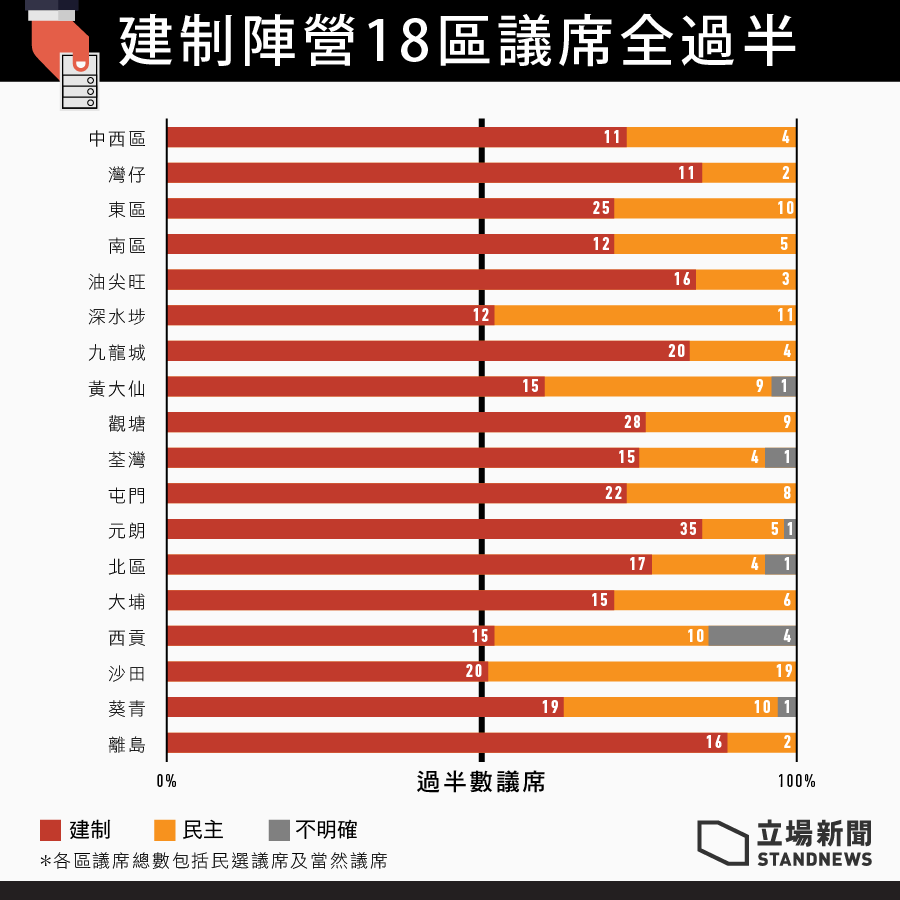
Distribution of district votes by
pan-democrats/independents/pro-establishment with number of voters and turnout
rate.
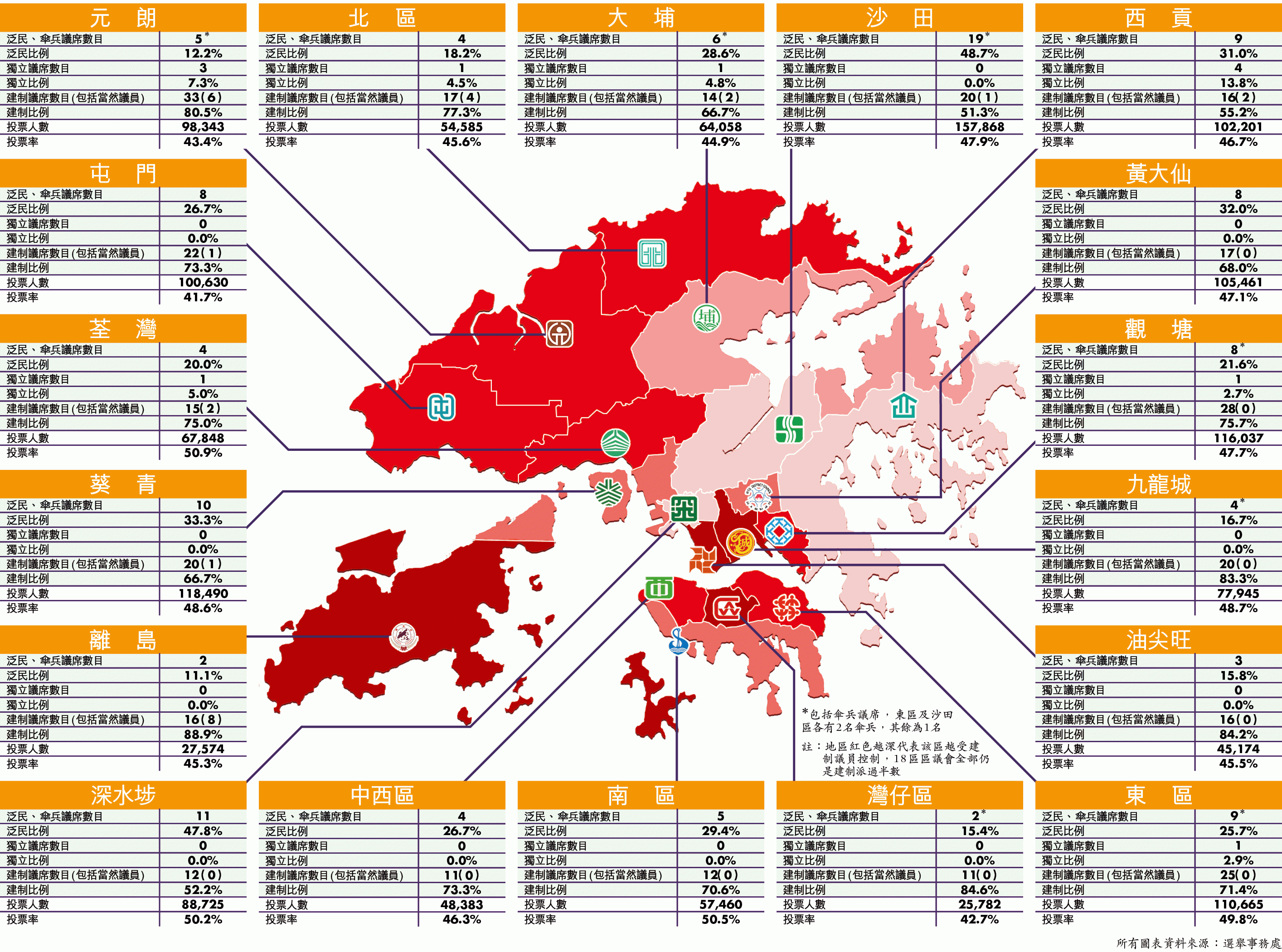
(Hong
Kong Economic Journal) November 25, 2015.
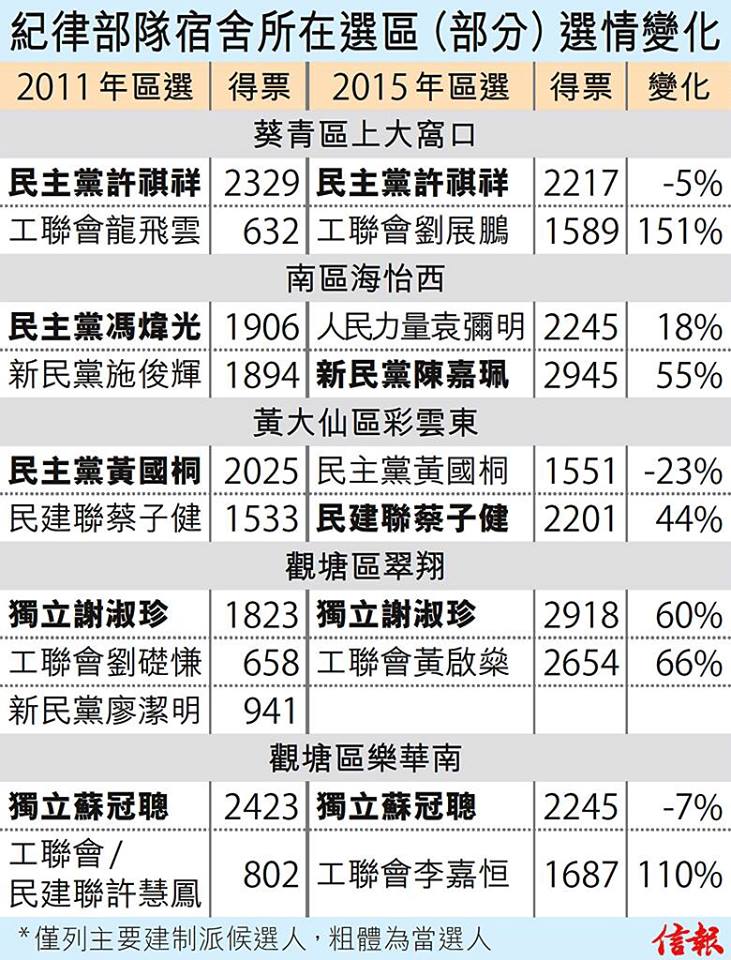
Both the total number of voters and the
voter turnout rate set new records. One reason is that the disciplinary
forces (police, fire department, correctional services, customs, etc) have
mobilized after Occupy Central.
In Upper Tai Wo Hau district, Kwai Ching,
the Democratic Party candidate received 2329 votes in 2011 and 2217 votes
in 2015. Meanwhile, the pro-establishment candidate received 632 votes in
2011 and 1589 votes in 2015 for a 151% increase. In particular, the Kwai
Yung Estate contains two buildings that are police family quarters. In
2011, there were only around 200 registered voters. In 2015, the number
surged to about 800 registered voters. Mostly likely, those 800 will vote
against the Democratic Party.
In Southern Horizon West district, Hong
Kong South, the Democratic Party candidate received 1906 votes in 2011 and
the People Power candidate got 2245 votes. Meanwhile, the New People Party
candidate got 1895 votes in 2011 but 2945 votes in 2015 for a 55%
increase.
In Choi Wan East district, Wong Tai Sin,
the Democratic Party got 2025 votes in 2011 and 1551 votes in 2015.
Meanwhile, the DAB candidate got 1533 votes in 2011 and 2201 votes in 2015
for a 44% increase.
In Chui Cheung district, Kwun Tong, the
independent candidate got 1823 votes in 2011 and 2918 votes in 2015.
Meanwhile, the two pro-establishment candidates got 658 and 941 votes in
2011, and the FTU candidate got 2654 votes in 2015 for a 66% increase.
In Lok Wah South district, Kwun Tong, the
independent candidate got 2423 votes in 2011 and 2245 votes in 2015.
Meanwhile, the DAB/FTU candidate got 802 votes in 2011 and the FTU
candidate got 1687 votes in 2015.
(Hong
Kong Free Press) How the Occupy protests shaped the District
Council elections. By Suzanne Pepper. November 28, 2015.
Yes, the District Council election was a
referendum on last yearÆs pro-democracy Occupy protests, because
pro-Beijing partisans did everything they possibly could to make it so.
The November 22 Election Day special issue of Ta Kung Pao led off with a
banner headline: ôUse Your Vote: Send the Trouble-Makers Packing.ö
Loyalists were finally acknowledging what
theyÆve been doing unannounced all along. The lowly District Councils are
not just about providing social services for neighborhoods in need. The
councils have been transformed into the base of Hong KongÆs political
power grid and they are now weighted heavily in BeijingÆs favor.
Turnout was a record high for the
typically low-interest district elections. Of Hong KongÆs 3.69 million
registered voters, only 3.12 million could participate because many
constituencies were uncontested û 68 of them, virtually all occupied by
pro-Beijing/pro-establishment contenders. Among those 3.12 million, only
1.46 million actually voted. But at 47%, the turnout was the highest ever
for a District Councils election.
What must have been the motivation?
Perhaps a poll will tell us, but then again perhaps not. In years past
Hong KongersÆ favorite answer to the question about why they voted was a
bland: ôBecause itÆs my civic duty.ö Better to pencil in some
preliminary conclusions. The results look like the after-effects of
Occupyà not just anti- but pro- as well and the tension between them,
hyped by the loyalist media campaign.
Last year, anti-Occupy forces had
threatened to register a million new voters and bury what pro-Beijing
loyalists love to write off as ôthe opposition.ö The threat didnÆt quite
materialize, although not for want of trying. Nor were pan-democrats
buried. Instead, they held their own and offshoots sprang up from the
Occupy movement in a way that its opponents didnÆt foresee. But then
neither did anyone else.
During the election campaign, the
pro-democracy camp as a whole ran scared. Instead of standing tall over
what they did last year, everyone was on the defensive, intimidated by the
anti-Occupy blitz. Even newcomer candidates from the Occupy generation who
defied conventional wisdom and refused to join pan-democratsÆ candidate
coordination effort were no exception. If people ask us about Occupy weÆll
explain, they would say, otherwise we wonÆt make an issue of it.
In the end, they didnÆt need to. The
battle was joined because loyalists made it the central focus of their
election campaign. Sympathizers came out to defend, just like they did on
that first day last year when the public rushed out onto the streets to
protect protesting students against the police tear gas barrage.
The upside for pan-democrats is that
thanks to Occupy and its opponents, voters are finally focusing on
political realities. Hong KongÆs District Councils are part of the larger
political struggle against the advance of mainland political ways. If
anyone wants to stand guard against that advance, they need to begin on
the first rung of the ladder, instead of writing off these councils as
democracy activists have always been inclined to do.
Success of anti-Occupy
stratagems
The downside of SundayÆs election for
pan-dems was the relentless professional campaign waged by their
opponents. The only thing they miscalculated was the upsurge of voters
willing to stand with Occupy.
Pro-democracy parties actually won 30
more seats than in 2011 and pro-establishment parties won one seat less.
The main pro-Beijing party, the Democratic Alliance for the Betterment and
Progress of Hong Kong (DAB) ran fewer candidates and won fewer seats. But
the difference was made up by other like-minded parties. The total seat
count is still weighted overwhelmingly in their favor against pan-dems:
298 seats to 120. Only 13 seats were won by independents who couldnÆt be
identified as being on one side or the other.
In terms of individual votes, those for
the pro-establishment parties were up by considerably more than those for
pan-dems. The totals for the two sides were: 783,427 pro-establishment;
539,500 pan-dem.
As for the councils themselves,
pro-establishment parties have retained their majorities on all but one.
With the abolition of appointed seats, pan-dems had their hearts set on
regaining the majority they used to hold on the suburban New Territories
Kwai Tsing District Council. In 2011 they won a bare majority, but the
government-appointed councilors reversed the balance.
Determined not to cede ground, the DAB
targeted Kwai Tsing, the campaign there was a chaotic mix of insinuation
and innuendo, and the result: 19 pro-establishment seats to only 10 for
pan-dems. Had they not proclaimed their goal beforehand, they might not
have alerted the DAB campaign to the districtÆs easy pickings.
In contrast, no one thought much about
the Shatin District Council, also in the New Territories, since it has
long been the turf of DAB ally Civil Force. To everyoneÆs surprise, and
despite the new Civil Force alliance with Regina IpÆs New PeopleÆs Party,
pan-dems made major gains. So Shatin has become the new Kwai Tsing with
pan-dems securing exactly half the seats on the Shatin council: 19 to 19.
But woe to those who find themselves in
the crosshairs of the pro-Beijing campaign machine because itÆs probably
no longer possible for any democrat to survive that kind of targeted
attention. And BeijingÆs attention is now focused squarely on seeing to it
that its forces win five more seats in the next Legislative Council
election. That would give them the two-thirds super-majority they need to
pass BeijingÆs electoral reform design over the objections of pan-dems who
vetoed the design last June.
Super-seat fiasco
Where better to look for those five seats
than the five so-called ôsuper-seatsö now reserved for District Councilors
on the Legislative Council? As a result, pan-dems greatest loss last
Sunday was their failure to hold or gain big-name representation on the
lower-level councils. Territory-wide name brands are needed because of
those conjoined seats. Although only District Councilors can nominate and
be nominated for the five Legco seats, they are ultimately elected by all
voters from a single territory-wide constituency. A sixth District Council
representative in the Legislative Council is elected only by the District
Councilors themselves.
The five super-seat addition is the
compromise design that then Democratic Party chairman Albert Ho Chun-yan
agreed to in 2010 when he was negotiating a reform proposal on behalf of
the entire democratic camp. How could he know one of those seats would
lead to his downfall five years later?
Democrats won three of the five seats in
the 2012 Legco election. Albert Ho had long represented the Lok Tsui
constituency on the New TerritoriesÆ Tuen Mun District Council and he won
one of the super-seats. Hard to remember now that in 2010-11, when he was
being pilloried by fellow democrats for agreeing to the compromise, he
could do no wrong in loyalist eyes. This year, after he had supported
Occupy, he became the target of almost daily diatribes and mocking
cartoons in the pro-Beijing press. That they meant to bring him down was
clear when a well-connected lawyer was tapped to run against him.
Still, Albert Ho might have survived but
fighting in the spotlight as he was, other pan-dems rushed to exploit the
attention. The loudest were the ôanti-mainland, Hong Kong-firstö Civic
Passion activists eager for another chance to settle scores old and new.
They never explained why they thought it was more important to bring down
Albert Ho than worry about Beijing winning five more Legco seats, but they
did succeed in what they set out to do.
Results: loyalist lawyer Junius Ho Kwan-yiu,
2,013 votes; Albert Ho, Democratic Party, 1,736 votes; Cheng Chung-tai,
Civic Passion 391 votes; Cheung Wing-wai, independent democrat, 25 votes;
Shum Kam-tim, pro-establishment, 94 votes; Yuen Wai-chung, democrat, 99
votes.
But at least Albert HoÆs opponents were
for real. Civic Passion is always looking for opportunities to attack what
they regard as back-sliding dithering democrats. Frederick Fung Kin-keeÆs
loss was skillfully contrived. Tapped to run against him was a young
Federation of Trade Unions candidate with the entire DAB/FTU campaign
machine behind her. Yet Fung, too, might have survived û had someone or
something not induced a disgraced ex-member of his own Association for
Democracy and PeopleÆs Livelihood (ADPL) party to come out of political
retirement and contest the constituency seat as well.
Eric Wong Chung-ki did what he was
presumably lured to do and threw the election to the FTU. Results: Joephy
Chan Wing-yan, FTU/DAB, 2,531 votes; Frederick Fung, ADPL, 2,432 votes;
Eric Wong, 215 votes.
Days before the election, name lists of
all the pro-democracy candidates who had been arrested last year during
the Occupy street blockades appeared in pro-Beijing papers along with
photographs to prove they were there. Albert Ho and Frederick Fung were
named. So was Civic Party legislator Kenneth Chan Ka-lok, who joined the
race in hopes of providing another big-name super-seat candidate. He lost
as well.
As a further result, pan-democratsÆ
safest super-seat prospects have been taken out. Only four remain
including incumbent James To Kun-sun who for some reason was spared the
full treatment. Perhaps because he has the least prospect of running or
winning again.
Of the four, the strongest possibility is
Gary Fan Kwok-wai of the Neo-Democrats. This is a Democratic Party
spin-off whose members quit after Albert HoÆs 2010 compromise. Neo-Dems
are new-style ballot-box radicals, unequivocally pro-Occupy, and a bright
spot for pan-dems in SundayÆs election. They won 15 of the 16 New
Territories seats they contested.
In contrast, the pro-establishment list
of prospective candidates for the super-seats has grown both longer and
stronger. From next to nothing in 2012, they can now boast a total of 10
incumbent Legco members who have won District Council seats and can be
considered viable super-seat candidates.
Pro-Occupy Success Stories
The big surprise was victory for so many
young and not-so-young newcomer candidates, although the results wouldnÆt
have been so unexpected had everyone not been so distracted by the
anti-Occupy drumbeats sounding from the other side. The pundits had
written them off and the older parties were exasperated, expecting they
would split the pro-democracy vote because so many of them had refused to
join pan-demsÆ candidate coordination coalition.
In the end, Albert Ho was one of the few
to suffer from the intervention of what was dubbed the ôumbrella
soldiers.ö Yellow umbrellas were last yearÆs Occupy symbol, although most
of these first-time candidates thought it the better part of political
wisdom not to feature it on their campaign hand-outs.
Because so many of them didnÆt identify
themselves as such, fact-checkers are having a hard time trying to
identify how many candidates there were to begin with and how many won.
Originally about 115 candidates refused to join pan-demsÆ candidate
coordination mechanism but those outliers included democrats of all kinds
and some of the old radical types like People Power and Civic Passion.
Best calculations are that the newcomer
candidates were close to 50 in all, and that they accounted for about
70,000 votes. That would be 15% of the total 480,000 won
by all pan-dem candidates, if that figure is correct. China Daily
has pan-dems receiving a total of 539,500 votes.
But as of now, eight to nine candidates
who will admit to being umbrella soldiers have been identified and they
scored two stunning upsets. Probably their cautious political instincts
served them well. Had the DAB/FTU campaign machine realized that two of
its Legislative Councilors were in danger of being unseated by such
unknowns, they could not have slipped so easily under the political radar.
The two legislators are Christopher Chung Shu-kun on Hong Kong Island and
Elizabeth Quat Pui-fan across town in Shatin.
Christopher Chung is the sort of loyalist
that even other loyalists would just as soon not feel obliged to vote for.
This time their Election Day get-out-the-vote routines that saved him in
the past missed their cue. They didnÆt see the 48-year-old Occupy
supporter Chui Chi-kin moving up from behind. This is his first foray into
politics and unlike many others, he is happy to cite Occupy as the reason
for his new-found political energy.
Elizabeth Quat was defeated by
28-year-old disabled candidate Yip Wing. His mentor is the lawmaker
activist Fernando Cheung of the Labour Party who stood with Occupiers
during some of their toughest confrontations with police last year.
Everyone is again downplaying the impact
of these umbrella soldier victories and especially of their possible
influence on next yearÆs all-important Legco poll. But the new political
atmosphere has also heralded, perhaps, a striking decline in something
old: the older generation of ôtraditionalö radicals. These are: the
original League of Social Democrats led by a now greying ôLong Hairö Leung
Kwok-hung; its People Power spin-off originally led by Raymond ôMad Dogö
Wong Yuk-man; and its spin-off Civic Passion that has just written an end
to Albert HoÆs political career. These three most rambunctious parties,
all Occupy advocates, fielded a total of 20 candidates, none successful.
After the last district election in 2011,
when Raymond WongÆs parachute jumping strategy went down to total defeat,
supporters took comfort by arguing that it wasnÆt a total defeat at all
because they had succeeded in growing their ôvoter baseö to build on in
future elections. Civic Passion didnÆt exist then, but the number of
ballots cast for LSD and PP in 2011 was: 21,833 and 23,465, respectively.
Last Sunday their respective shares were: 6,526 and 14,477. The template
for Hong Kong radicalism is being passed to a new generation.
Since the newcomer candidates have been
so reluctant to explain who and what they are, maybe itÆs better to
consider what the public thought it was voting for. My constituency offers
a glimpse of the political trends that marked this election.
The FTU incumbent is new to the district,
first elected in 2011. He was by far the most diligent starting from voter
registration last summer right through Election Day and the day after when
he stood on the same street corner to thank voters for electing him. His
hand-outs were plentiful and slickly produced.
A second candidate also ran an energetic
campaign, well-enough financed, and with some good ideas about service to
the district. He was explicit in denouncing political parties and
presenting himself as a true independent.
The third candidate apparently had the
least money to spend on her campaign and was the least familiar with the
provision of district-level services. But she provided a clear if discrete
signal of political sympathies in line with those of the Occupy
generation. She proclaimed herself to be non-party and non-faction, but
for Hong Kong self-determination and autonomy. Approximate results: FTU,
3,500 votes; Independent, 600; Hong Kong self-determination, 2,000.
Internet comments:
- (Bastille
Post) Frederick Fung (ADPL) was defeated by 25-year-old Chan Wing-yan
(FTU) by a margin of 99 votes. Fung received 2432 votes while Chan received
2531 votes. Meanwhile the third candidate Wong Chung-ki took 215 votes. Fung
said Wong took 215 votes away from him, which would have been his margin of
victory. In 2011, Fung received 2528 votes. So his votes were not iron-clad.
Albert Ho (Democratic Party) lost by more
than 200 votes to Junius Ho. Afterwards, Ho said that he won't blame Cheng
Chung-tai (Civic Passion) for stealing his votes. The fact is that Junius Ho
got 2031 votes, Albert Ho got 1736 votes, Cheng Chung-tai got 391 votes,
Yuan Wai-chung got 99 votes, Shum Kam-tim got 94 votes. This year, Shum
Kam-tim entered the election with the support of Lau Wong-fat and therefore
he can be considered pro-establishment. In 2011, Shum Kam-tim got 1477
votes. But this year nearly all of those votes went to Junius Ho. If Shum
wasn't in the field, those 94 votes would have gone mostly to Junius Ho as
well. In 2011, Albert Ho got 1876 votes while League of Social Democrats'
Chan Wai-yip votes. So Albert Ho lost votes while Chan Wai-yip's radical
voters went to Cheng Chung-tai. Even if Cheung Chung-tai was not in the
field, Ho may not be able to attract those voters. So Ho is better off not
trying to blame Cheng for his woes.
- (Apple
Daily) Among the 431 district council seats, the pro-establishment
camp won 298 (69%). The pan-democrats won 112 (26%). The umbrellas soldiers
won 8 seats (2%). Independents won 13 seats (3%). Compared to 2011, the
pro-establishment camp lost 3 seats while the pan-democrats gained 21 seats.
In terms of votes, the pro-establishment camp won 780,000 votes this time
compared to 670,000 last time. The pan-democrats went to 470,000 from
440,000. The umbrella soldiers got around 70,000.
- This means the ratio of
pro-establishment versus pan-democrats is 780000 to 470000 (64% to 36%).
- No, the ratio of pro-establishment versus pan-democrats is 780000 to
540000 (59% to 41%), because you have to add the umbrella soldiers.
- That's hilarious. When the umbrella soldiers first appear, you condemn
them for stealing your votes and exclude them from your power circle. But
now you are counting as being in your camp?
- The total number of votes is 1,460,000.
The pro-establishment camp has a 53% share, the pan-democrats a 32% share
and the umbrella soldiers a 5% share.
The total number of votes in 2011 was 1,200,000. The pro-establishment
camp had a 56% share and the pan-democrats a 37%.
- When you look at the share of votes,
you are ignoring the fact that 66 pro-establishment candidates were
automatic winner in the absence of other candidates. No elections were
held in those 66 districts. Given that no one bothered to challenge these
councilors, wouldn't it be fair to assume that they would have won big?
- The pro-establishment camp has majority
control of all 18 district councils just as before.
- The Democratic Party said that they are
happy with gaining one seat from 42 to 43. Well, in 2011, they actually
won 47 seats. But some of those elected district council eventually
resigned or were expelled from the party, and that is how they ended up
with only 42 seats at the time of this election. It is not a proud record
to purge 10% of your party roll.
- (Oriental
Daily) According to election regulations, all candidates must make a
deposit of $3,000 at the time of application in order as a sign of good
faith to run in the election. After the election, if the candidate gets less
than 5% of the votes in that district, that $3,000 will be forwarded to the
tax coffers. If the candidates gets 5% or more, the money is refunded. In
these elections, 54 out of 935 candidates had their $3,000 confiscated,
resulting a total of $162,000 for the tax coffers. Many of the 54 are
so-called "fake umbrella soldiers" all of whom got fewer than 100 votes. For
example, in the Lok Tsui district with six candidates, three lost their
$3,000 deposit. The lowest number of votes received by a candidate is 16 in
the Kai Tak North district, Kowloon City.
- According to the Wikipedia table above,
Pro-Beijing camp: 54.18% share of voters; 295 seats out of 482 candidates
Pro-democracy camp: 40.04% share of voters; 125 seats out of 333 candidates
Independents: 5.45% share of voters; 9 seats out of 117 candidates
The rule-of-thumb is that the pro-democracy camp has a 60/40 (or 55/45)
advantage in the legislative council elections. But that is not so in the
district council elections.
More importantly from the Wikipedia table,
here is how the radical political parties fared:
People Power: 0.80% share of voters; 0 seats out of 9 candidates
League of Social Democrats: 0.45% share of voters; 0 seats out of 5
candidates
Civic Passion: 0.21% share of voters; 0 seats out of 6 candidates
And these are the people who also say that they represent the people of Hong
Kong.
- The problem with Cheng Chung-tai's
campaign is that he is disconnected from the people. Running for a
district council seat, his slogan is "Down with the Communists!" There is
nothing about the job of a district councilor that is connected to
overthrowing the Communist regime. If that is what he really wants to do,
he should bring his followers and march north to Shenzhen.
- In Cheng Chung-tai's worldview, the
people of Hong Kong are divided into three categories:
(1) several hundred valiant resisters led by Civic Passion
(2) several tens of thousands of local communists obeying orders from
Beijing
(3) several million Hong Kong pigs who have to led to the troughs to be
fed.
Fine.
When the election came, Cheng found himself having to beg the Hong Kong pigs to
vote for him. Should be it a big surprise that the pigs won't vote for
someone who calls them pigs?
- (Facebook)
https://www.facebook.com/bbtauseeworld/videos/428730733990976/ Li
Ting-fung (ADPL) ran and lost in the Kai Tak North district, Kowloon City.
But here is an interesting post-race video.
0:01 (Tatooed man) My daughter is only 15
years old. You let her work until 3am. What a joke! If you don't have
people, you say so. I can get you one hundred plus people.
0:10 (Voice over) Candidate #4 in Kai Tak North, Li Ting-fung (ADPL) lost
his election. He is being accused of getting a 15-year-old girl to work as
a volunteer. The girl even spent the night in Li's home. For three nights
in a row, she had no contact with her family. On election night, this
tatooed man came down to the voting station to look for his daughter. He
suspects that Li and his daughter has an amorous relationship.
0:32 (Tatooed man) That is, you believe that if you need her to help out,
you don't need to obtain parental consent?
0:38 (Li) She consented herself.
0:39 (Tatooed man) Huh? Fifteen is past the age of consent?
0:42 (Li) That is what she said.
0:44 (Tatooed man) If that is the case, we wouldn't be calling age 18 as
adulthood. The courts wouldn't require us to supervise her until she is
18.
0:51 (Li) Being a volunteers has nothing to do with age.
0:53 (Tatooed man) Volunteer? I fear that she might be lured to become a
volunteer. She was lured so that she didn't come home.
1:01 (Voice over) So the man stood at the voting station to wait for Li
Ting-fung. It is alleged that Li Ting-fung was aware that this man is the
father of the young girl, so he did not step outside. But the vote
counting has to finish eventually. When he came out, the father confronted
Li.
1:05 (Female) Cool down first!
1:07 (Tatooed man) I was speaking very politely to you before. It is you
who are saying things that human beings should not be saying. She came out
and that's her personal business. What kind of talk is this?
1:23 (Female) He replied inappropriately. He is tired.
1:28 (Tatooed man) How many hours have I sat here? Right or wrong?
- (Apple
Daily) Frederick Fung said that his opponent Chan Wing-yan has a
strategy of doling out materials. Based upon his own obsevations, Chan received four
to five times more in campaign resources. Every day she gave away lunch
boxes to senior citizens, even threatening no more lunch boxes if they vote for Fung. At the same time, mainland village mayors have detailed lists of Hong
Kong relatives to call directly to vote. In addition, Fung said that he
would have won without the presence of the third candidate Wong Chung-ki.
- Well, who is going to know whom the
senior citizens voted for? In Taiwan, voters have been educated to take
bribes from all sides and then vote by secret ballot according to their conscience.
- Mainland village mayors have lists of
relatives to call? This makes no sense statistically. (Facts
and Details) China has about 1 million villages each with an
average of 916 people. One of them is the mayor. So the probability of
having a mayor as a relative in China is not that high. About 5,000 people
voted in Lai Kok district. How many of those have a mainland village mayor
as a relative?
- Besides, this is a political matter, so the person in charge would be
the village party secretary and not the mayor. Fung is completely out of
touch with mainland matters.
- (Headline
Daily) November 26, 2015. Post-election speeches. By Chris Wat
Wing-yin.
2012 Tsai Ying-wen after losing the
presidential election to Ma Ying-jeou: "We accept that we lost the
election. We accept the decision of the people of Taiwan for this
election. We know that many of our supporters are heartbroken. But we
still have to congratulate President Ma. In the next four years, we hope
that he will listen to the voices of the people, to focus on governing, to
treat each and every citizen fairly, to not let the people down ... four
years ago, we had been without hope. The mountaintop that we want to reach
seemed to be unreachable. But we grit our teeth and united. In the past
four years, we moved ahead step by step. This time, we almost reached the
mountaintop. We fell just one mile short ... Faced with the outcome today,
the DPP will hold a self-examination and consider this to be a warning. I
will assume full responsibility for the defeat ... you can cry, but you
must not be discouraged; you can be sad, but you must not give up ... some
day, we will be back. We will not give up."
2015 Frederick Fung after losing the
re-count: "I accept the decision by the voters. They use somebody who used
materialistic means to build a network. I know that materialistic means
are more attractive in a community with low income ..." If I wasn't the
live broadcast, I cannot believe that a 30-year-old veteran politician
could say something like this to insult the voters. Frankly, these words
not insult those who didn't vote for him; it also smeared the entire
community. So over the past 30 years, this was how he regarded low-income
residents.
2015 James To after winning his election:
"I am different from the pro-establishment candidate. He has a list of one
thousand plus voters and he makes one thousand plus phone calls. So when
he doles out snake banquets, vegetarian dinners, moon cakes and rice
dumplings, he can call them directly or use Whatsapp to tell them to vote
for him. I am different. I cannot reach out to my supporters. I don't have
their telephone numbers. I have to depend on my volunteers to call those
that they know ..." As district councilor, he does not have a single
telephone number of a resident. Instead, he blamed his competitor for
knowing so many residents. And he jealously insulted the voters for giving
out their telephone numbers in exchange for favors. Nobody has poorer EQ
than this.
- "The Pro-Establishment Camp Has Fewer
District Councilors!" Well, this was a foregone conclusion if you are
paying any amount of degree of attention. In 2011, 412 of the seats were
directly elected and another 19 seats were appointed. All 19 appointees
were pro-establishment. In 2015, the 19 appointed seats were eliminated so
that
all 431 of the seats were directly elected. You don't expect all 19
elected seats to be pro-establishment, do you? So, other things being
equal, there should be fewer pro-establishment district councilors and
more pan-democratic ones.
- The triumph of the Umbrella Soldiers?
Thus spoke the Yellow Ribbon Media (such as Apple Daily/Next Magazine,
Ming Pao, RTHK). Not so quickly. After the election, the tally was that 25
organizations fielded 55 candidates with 8 winning. Well, is this a
glorious victory? Is this the conclusive evidence that the people of Hong
Kong endorse Occupy Central, Shopping Revolution and Hong Kong
independence?
On election day, of the more than 3
million registered voters, how many are aware that these candidates are
Umbrella Soldiers? How many of these candidates boasted their credentials
of occupying for 79 days and the huge gains that they have achieved as
result? With due respect, that number is almost zero!
These candidates' main appeal is that they are young and inexperienced.
They were deceiving the voters by concealing their true identities.
The Umbrella Soldiers come from different
organizations with different goals and methods. They are not a cohesive
force. So it is not as if they are a political party with 8 district
councilors.
(Hong
Kong Free Press)
Should I answer exit polls?
It is up to voters whether or not they
answer questions from exit poll staffers.
Usually, pro-democracy groups are unlikely
to do large scale exit polls due to limited resources. The Public Opinion
Programme of the University of Hong Kong will be conducting exit polls as it
has done for other elections.
The Hong Kong Research Association, the
Association of Community in Hong Kong and the Hong Kong Society Monitor are
the three other main groups conducting exit polls. These are commonly
considered to be affiliated with the pro-Beijing camp. Of the 363
constituencies where elections are being held, these three groups
will conduct exit polls in 282 of them, reports Apple Daily. In the past,
the groups have been accused of sending exit poll data to candidates to help
them win the elections.
However, organisations conducting exit
polls should not release the results to any candidate or any person or
organisation which has publicly expressed support for any candidate, or any
organisation with a member or members contesting in any constituency covered
by the exit poll. They should not make specific remarks or predictions on
the performance of any individual candidate before the close of the poll, as
this may affect electorsÆ voting intentions and have an impact on election
results.
Hong
Kong Research Association, as of 10:45pm, November 22, 2015.
|
Code |
Constituency |
Name |
Exit Poll Estimate% |
Ac tual # |
Actual % |
Political affiliation |
|
B09 |
Broadwood |
SIU See-kong |
17.5% |
141 |
5.8% |
*Independent |
|
B09 |
Broadwood |
MAK Kwok-fung Michael |
39.6% |
939 |
38.6% |
League of Social Democrats |
|
B09 |
Broadwood |
TSE Wai-chun Paul |
42.9% |
1,350 |
55.6% |
Independent |
|
C10 |
Siu Sai Wan |
WONG Kwok-hing |
57.2% |
1,981 |
49.6% |
The Hong Kong Federation of Trade Unions (FTU) |
|
C10 |
Siu Sai Wan |
CHU Yat-on |
15.3% |
783 |
19.6% |
|
|
C10 |
Siu Sai Wan |
TAM Tak-chi |
27.5% |
1,229 |
30.8% |
People Power |
|
C34 |
Yue Wan |
CHUNG Shu-kun Christopher |
47.8% |
1,863 |
47.9% |
Democratic Alliance for the Betterment and Progress of Hong Kong |
|
C34 |
Yue Wan |
CHUI Chi-kin |
52.2% |
2,026 |
52.1% |
Independent |
|
D06 |
South Horizons East |
LAM Kai-fai |
52.7% |
2,180 |
46.7% |
Independent Candidate |
|
D06 |
South Horizons East |
CHAN Ka-lok |
36.7% |
1,845 |
39.5% |
Civic Party |
|
D06 |
South Horizons East |
AU Yuen-fat Joseph |
10.7% |
643 |
13.8% |
|
|
D07 |
South Horizons West |
CHAN Judy Kapui |
68.0% |
2,945 |
56.7% |
New PeopleÆs Party |
|
D07 |
South Horizons West |
YUEN Mi-ming Erica |
32.0% |
2,245 |
43.3% |
People Power |
|
E08 |
Olympic |
KO Hiu-wing |
47.7% |
1,414 |
48.0% |
Independent Candidate |
|
E08 |
Olympic |
TO Kun-sun James |
52.3% |
1,531 |
52.0% |
The Democratic Party |
|
F10 |
Lai Kok |
CHAN Wing-yan |
51.4% |
2,531 |
48.9% |
DAB/FTU |
|
F10 |
Lai Kok |
FUNG Kin-kee Frederick |
46.4% |
2,432 |
47.0% |
ADPL |
|
F10 |
Lai Kok |
WONG Chung-ki Eric |
2.2% |
215 |
4.2% |
|
|
G15 |
To Kwa Wan North |
LEE Wai-king Starry |
82.9% |
1,544 |
80.2% |
DAB |
|
G15 |
To Kwa Wan North |
SHUM Tai-fung |
8.9% |
204 |
10.6% |
|
|
G15 |
To Kwa Wan North |
LAM Yi-lai |
8.2% |
177 |
9.2% |
|
|
G18 |
Whampoa East |
LEUNG Mei-fun |
53.0% |
2,345 |
47.1% |
Kowloon West New Dynamic/BPA Services Company Limited |
|
G18 |
Whampoa East |
YAU Wai-ching |
39.0% |
2,041 |
41.0% |
Youngspiration |
|
G18 |
Whampoa East |
LAW Shek-ming |
8.1% |
596 |
12.0% |
|
|
H20 |
King Fu |
WONG Chun-kin |
40.2% |
2,377 |
37.8% |
FTU |
|
H20 |
King Fu |
WU Chi-wai |
59.8% |
3,907 |
62.2% |
The Democratic Party |
|
K02 |
Yeung Uk Road |
CHAN Han-pan |
69.7% |
2,075 |
62.7% |
Democratic Alliance for the Betterment and Progress of Hong Kong |
|
K02 |
Yeung Uk Road |
LAM Sek-tim |
30.3% |
1,233 |
37.3% |
Tsuen Wan Community Network |
|
K06 |
Discovery Park |
CHIU Yan-loy |
28.6% |
2,020 |
35.5% |
Labour Party |
|
K06 |
Discovery Park |
TIEN Michael Puk-sun |
71.4% |
3,674 |
64.5% |
New People's Party |
|
L19 |
Lok Tsui |
HO Chun-yan |
35.5% |
1,736 |
39.8% |
The Democratic Party |
|
L19 |
Lok Tsui |
HO Kwan-yiu |
50.6% |
2,013 |
46.2% |
Independent |
|
L19 |
Lok Tsui |
YUEN Wai-chung |
2.0% |
99 |
2.3% |
MESSAGE |
|
L19 |
Lok Tsui |
CHEUNG Wing-wai |
2.3% |
25 |
0.6% |
|
|
L19 |
Lok Tsui |
CHENG Chung-tai |
7.3% |
391 |
9.0% |
Civic Passion |
|
L19 |
Lok Tsui |
SHUM Kam-tim |
2.3% |
94 |
2.2% |
|
|
M28 |
Tin Yiu |
LEUNG Chin-hang |
42.8% |
1,552 |
47.5% |
|
|
M28 |
Tin Yiu |
LEUNG Che-cheung |
57.2% |
1,713 |
52.5% |
*Democratic Alliance for the Betterment and Progress of Hong Kong/NTAS |
|
N08 |
Fanling South |
HO Shu-kwong Raymond |
64.7% |
1,824 |
64.8% |
*Independent Candidate |
|
N08 |
Fanling South |
WONG Sing-chi |
35.3% |
992 |
35.2% |
Third Side |
|
N08 |
Wan Hang |
SUN Wai-kei |
48.2% |
2,313 |
41.8% |
|
|
Q19 |
Wan Hang |
FAN Gary Kwok-wai |
49.3% |
3,104 |
56.1% |
Neo Democrats |
|
Q19 |
Wan Hang |
LAI Tze-wah |
2.5% |
117 |
2.1% |
Independent |
|
R24 |
Chung On |
YIP Wing |
42.0% |
2,506 |
51.3% |
Labour Party |
|
R24 |
Chung On |
QUAT Elizabeth |
58.0% |
2,376 |
48.7% |
DAB |
|
S12 |
Kwai Fong |
CHAN Man-luen-ying |
34.4% |
1,624 |
33.0% |
HKFLU |
|
S12 |
Kwai Fong |
LEUNG Yiu-chung |
65.6% |
3,301 |
67.0% |
Neighbourhood & WorkerÆs Service Centre |
|
S15 |
Cho Yiu |
PAU Ming-hong |
65.2% |
2,986 |
62.3% |
DAB |
|
S15 |
Cho Yiu |
LO Wai-lan |
10.4% |
580 |
12.1% |
*BPA |
|
S15 |
Cho Yiu |
CHAN Tak-cheung |
24.5% |
1,230 |
25.6% |
League of Social Democrats |
|
T02 |
Yat Tung Estate North |
TANG Ka-piu |
72.1% |
3,061 |
77.3% |
F.T.U |
|
T02 |
Yat Tung Estate North |
LEUNG Hon-wai |
28.0% |
900 |
22.7% |
|
These were the 20 major races.
The exit poll numbers were posted at the HKRA website soon after 1030pm and
long before the actual vote tallies appeared. The HKRA exit polls correctly
identified 19 out of 20 winners with only one wrong pick in district R24.

Second round of
exit
polls released at 12:10am November 23, 2015, also before the actual
numbers were known. These are the races with some better-known "Umbrella
Soldiers" included.
|
Code |
Constituency |
Name |
Exit Poll Estimate% |
Ac tual # |
Actual % |
Political affiliation |
|
A04 |
Peak |
CHAN Ho-lim Joseph |
85.5% |
1837 |
85.3% |
Liberal Party |
|
A04 |
Peak |
CHAN Shu-moon |
14.5% |
317 |
14.7% |
Independent Candidate |
|
A07 |
Kwun Lung |
YEUNG Hoi-wing |
62.0% |
2491 |
61.4% |
DAB |
|
A07 |
Kwun Lung |
LEUNG Chung-hang Sixtus |
38.0% |
1569 |
38.6% |
Youngspiration |
|
B02 |
Oi Kwan |
TANG King-yung Anna |
72.5% |
1367 |
59.9% |
DAB |
|
B02 |
Oi Kwan |
WONG Sui-lung |
27.5% |
915 |
40.1% |
|
|
B07 |
Tai Hang |
WONG Ching-chi Gigi |
47.9% |
1148 |
45.1% |
New PeopleÆs Party |
|
B07 |
Tai Hang |
YEUNG Suet-ying Clarisse |
52.1% |
1398 |
54.9% |
Independent Candidate |
|
B10 |
Happy Valley |
NG Kam-chun |
68.9% |
1377 |
60.5% |
Independent |
|
B10 |
Happy Valley |
CHIEN Ka-wo Kelvin |
31.1% |
900 |
39.5% |
|
|
B11 |
Stubbs Road |
AU Lai-chong |
27.9% |
642 |
35.8% |
|
|
B11 |
Stubbs Road |
WONG Wang-tai |
72.1% |
1150 |
64.2% |
|
|
B12 |
Southorn |
LEE Pik-yee |
85.1% |
1463 |
77.0% |
Independent |
|
B12 |
Southorn |
YEUNG Yau-fung |
14.9% |
437 |
23.0% |
|
|
C02 |
Tai Koo Shing East |
TSE Tsz-kei |
56.0% |
2587 |
49.2% |
New PeopleÆs Party |
|
C02 |
Tai Koo Shing East |
WONG Chun-sing Patrick |
44.0% |
2674 |
50.8% |
Independent |
|
C05 |
Shaukeiwan |
LAM Sum-lim |
50.1% |
1444 |
48.5% |
Democratic Alliance for the Betterment and Progress of Hong Kong |
|
C05 |
Shaukeiwan |
POON Wing-yin |
6.1% |
107 |
3.6% |
|
|
C05 |
Shaukeiwan |
LEUNG Wing-sze |
43.9% |
1429 |
48.0% |
|
|
E12 |
Tai Nan |
CHONG Wing-charn Francis |
52.8% |
1424 |
47.6% |
Kowloon West New Dynamic/BPA |
|
E12 |
Tai Nan |
CHIU Yuk-kwong |
18.0% |
606 |
20.3% |
Youngspiration |
|
E12 |
Tai Nan |
FUNG Joshua Man-tao |
29.2% |
962 |
32.2% |
The Democratic Party |
|
J14 |
Sau Mau Ping South |
CHAN Yiu-hung Jimmy |
76.0% |
2418 |
70.6% |
Independent |
|
J14 |
Sau Mau Ping South |
KAI Ming-wah |
6.5% |
340 |
9.9% |
*The Democratic Party |
|
J14 |
Sau Mau Ping South |
CHENG Kwok-chun |
17.5% |
668 |
19.5% |
Kowloon East Community |
|
K02 |
Yeung Uk Road |
CHAN Han-pan |
69.7% |
2075 |
62.7% |
Democratic Alliance for the Betterment and Progress of Hong Kong |
|
K02 |
Yeung Uk Road |
LAM Sek-tim |
30.3% |
1233 |
37.3% |
Tsuen Wan Community Network |
|
K11 |
Tsuen Wan West |
LAM Lam Nixie |
62.2% |
2463 |
51.8% |
Democratic Alliance for the Betterment and Progress of Hong Kong |
|
K11 |
Tsuen Wan West |
POON Chiu-lam |
23.0% |
1500 |
31.5% |
Tsuen Wan Dynamic for the People |
|
K11 |
Tsuen Wan West |
CHU Shun-ming |
14.8% |
793 |
16.7% |
|
|
L10 |
Hing Tsak |
TSUI Fan |
64.8% |
2673 |
64.1% |
The Hong Kong Federation of Trade Unions |
|
L10 |
Hing Tsak |
CHAN Sze-nga |
35.2% |
1498 |
35.9% |
|
|
L28 |
Fu Tai |
CHAN Manwell |
63.2% |
2823 |
73.0% |
The Hong Kong Federation of Trade Unions |
|
L28 |
Fu Tai |
HO Wai-cheung |
36.8% |
1044 |
27.0% |
Tuen Mun Community Concern Group |
|
M18 |
Chung Wah |
WONG Wai-ling |
72.1% |
1775 |
64.8% |
Democratic Alliance for the Betterment and Progress of Hong Kong |
|
M18 |
Chung Wah |
CHAN Ka-kui |
27.9% |
965 |
35.2% |
|
|
M31 |
Fairview Park |
YAU Tai-tai |
43.1% |
1596 |
44.8% |
|
|
M31 |
Fairview Park |
LEUNG Wai-kwan |
30.5% |
144 |
4.0% |
|
|
M31 |
Fairview Park |
TO Ka-lun |
26.5% |
1826 |
51.2% |
|
|
N03 |
Cheung Wah |
CHAN Yuk-ming |
30.9% |
1814 |
34.4% |
The Democratic Party |
|
N03 |
Cheung Wah |
YUEN Hoi-wai Feder |
6.3% |
178 |
3.4% |
Non-affiliated Candidate |
|
N03 |
Cheung Wah |
YIP Yiu-shing Chris |
30.3% |
1569 |
29.8% |
Independent |
|
N03 |
Cheung Wah |
WONG Ka-ho |
32.6% |
1710 |
32.4% |
North of The Rings |
|
P01 |
Tai Po Hui |
LI Kwok-ying |
66.1% |
1096 |
55.9% |
DAB |
|
P01 |
Tai Po Hui |
CHOY Wing-mui Molly |
33.9% |
865 |
44.1% |
|
|
P11 |
Wan Tau Tong |
YU Chi-wing |
66.0% |
2711 |
56.1% |
*Independent Candidates |
|
P11 |
Wan Tau Tong |
CHENG Wai |
34.0% |
2123 |
43.9% |
|
|
P16 |
Old Market & Serenity |
LAU Yung-wai |
52.1% |
2170 |
56.1% |
Independent Candidate |
|
P16 |
Old Market & Serenity |
CHEUNG Kwok-wai |
47.9% |
1699 |
43.9% |
DAB |
|
Q22 |
Fu Nam |
CHAN Pok-chi |
60.8% |
2207 |
49.9% |
DAB |
|
Q22 |
Fu Nam |
CHAN Yiu-ming |
39.2% |
2213 |
50.1% |
Independent Democrat |
|
Q25 |
Kwong Ming |
CHONG Yuen-tung |
76.1% |
3373 |
64.8% |
DAB |
|
Q25 |
Kwong Ming |
SHI Hau-kit Simon |
13.0% |
777 |
14.9% |
|
|
Q25 |
Kwong Ming |
CHOI Ming-hei |
11.0% |
1055 |
20.3% |
*Independent Democrat |
|
R15 |
Wan Shing |
HO Hau-cheung |
62.5% |
1989 |
51.3% |
New PeopleÆs Party/ Civil Force |
|
R15 |
Wan Shing |
WONG Leung-hi |
17.7% |
962 |
24.8% |
Independent Democrats |
|
R15 |
Wan Shing |
CHEUNG Tak-wing |
19.8% |
927 |
23.9% |
|
|
R20 |
Chung Tin |
TANG Wing-cheong |
42.5% |
1268 |
35.6% |
Civil Force/New PeopleÆs Party |
|
R20 |
Chung Tin |
LO Yuet-chau |
16.2% |
662 |
18.6% |
|
|
R20 |
Chung Tin |
WONG Hok-lai |
41.3% |
1631 |
45.8% |
Shatin Community Network |
|
S28 |
Ching Fat |
LEE Hon-sam |
8.1% |
282 |
5.2% |
Ching Fat Living Concern |
|
S28 |
Ching Fat |
LAM Chui-ling Nancy |
54.7% |
2648 |
48.6% |
Independent |
|
S28 |
Ching Fat |
LAU Chi-kit |
34.3% |
2283 |
41.9% |
The Democratic Party |
|
S28 |
Ching Fat |
WONG Kin-long |
2.9% |
233 |
4.3% |
|
|
T05 |
Tung Chung South |
CHOW Ho-ding Holden |
56.9% |
2161 |
53.0% |
DAB |
|
T05 |
Tung Chung South |
WONG Chun-yeung |
43.1% |
1917 |
47.0% |
|
There were 27 districts in the
second round, of which the winners were incorrectly called in 4 cases (C02,
M31, Q22 and R20). For example, R20 would have been classified as too close to
call.

The Hong Kong University Public Opinion
Programme conducted exit polls but restricted distribution of their data to
media sponsors (such as Cable TV). On the television news programs, they did
not show any numbers. Instead they showed qualitative information (such as
"very little chance" or "equal chance"). For example, in Lok Tsui district,
they reported that Junius Ho and Albert Ho have "equal chance" whereas the
other four candidates have "very little chance"). In Lai Kok district, they
reported that Frederick Fung and Chan Wing-yan have "equal chance." But
everybody knows before the voting started. This is not imparting anything new
or surprising.
1985: 37.5%
1988: 30.3%
1991: 32.5%
1994: 33.1%
1999: 35.82%
2003: 44.06%
2007: 38.83%
2011: 41.49%
2015: 47.01%
| Time of Day |
2007 |
2011 |
2015 |
| 0830am |
1.08% |
1.19% |
1.28% |
| 0930am |
3.30% |
3.59% |
3.85% |
| 1030am |
6.26% |
6.73% |
6.79% |
| 1130am |
9.50% |
10.10% |
10.90% |
| 1230pm |
12.34% |
13.20% |
14.49% |
| 0130pm |
14.83% |
15.85% |
17.68% |
| 0230pm |
17.48% |
18.73% |
21.00% |
| 0330pm |
20.05% |
21.48% |
24.21% |
| 0430pm |
22.68% |
24.33% |
27.40% |
| 0530pm |
25.30% |
27.08% |
30.62% |
| 0630pm |
28.07% |
30.20% |
33.99% |
| 0730pm |
30.63% |
32.88% |
37.15% |
| 0830pm |
33.19% |
35.57% |
40.28% |
| 0930pm |
35.97% |
38.54% |
43.65% |
| 1030pm |
38.83% |
41.49% |
47.01% |
(Oriental
Daily) The final two tricks. By Tik Chi-yuen. November 21, 2015.
The District Council elections
have reached the final stage. The preceding months of campaigning were mainly
about hanging out banners, posting posters, distributing leaflets, manning
street booths, social media, home visits, etc. But at the final moment, there
are only two tricks left in the election campaign -- the emergency appeal and
the smear.
In recent days,
candidates from both sides are making emergency appeals. The emergency
appeal is intended to mobilize your supporters so that they feel an urgency
to vote. With it, the supporters may get complacent and has less urgency to
vote.
The emergency is
not going to expand your support base. It is done to consolidate your
support base, which was built up long before. Therefore the emergency appeal
can only be invoked in the final two or three days before the balloting.
Furthermore, it has to be done throughout the entire district. Past
experience says that the emergency appeal can motivate the supporters to
vote. However, after having the emergency appeal over each and every
election, the effect today may be lessened.
As for the smear, it is the last trick. The
smear will not be used early on, because that will give your opponent an
opportunity to explain. After the smear information is released, a number of
innuendoes are spread out by whispering and disseminated as quickly. The
smear is especially effective for the undecided voters. There are many
controversies in elections that are reported by certain media, but the
smears are even more prevalent on Internet discussion forums and Facebook.
There is so much information that it is hard to tell who is right or wrong.
But the smear may also have the effect of driving some disgusted voters away
from voting at all.
These District Council elections will serve as indicators. Firstly, the
election results will affect the plans of the political parties for next
year's Legislative Council elections. Some elected District Councilors will
qualify to run for the five District Council (2) seats in the Legislative
Council. Secondly, the election results will be a referendum on the Umbrella
Movement. If the pan-democrats win big, it will be a vindication of the
Umbrella Movement.
(Sky
Post) Day of Exorcism. By Chris Wat Wing-yin. November 20, 2015.
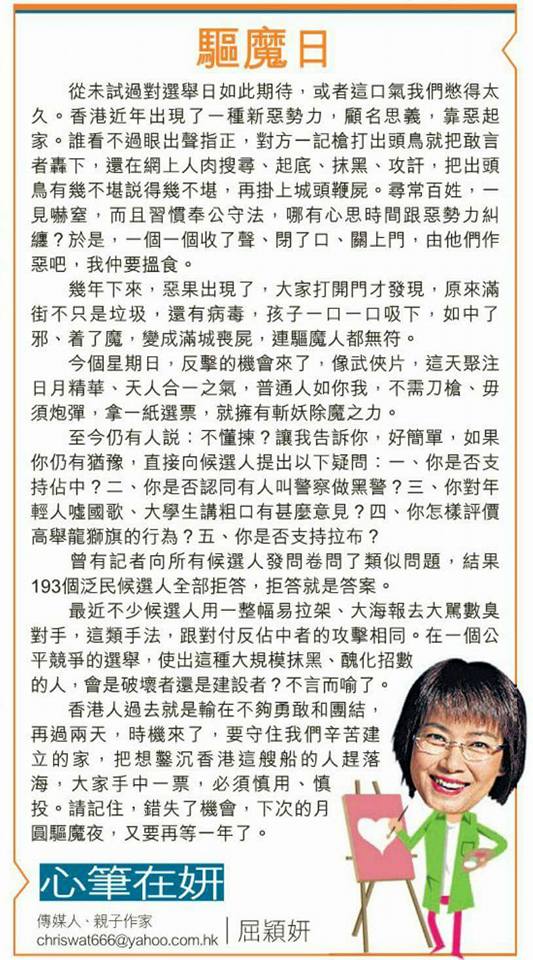
I have never had so much expectations for an
election day. Perhaps the anger has been pented up for too long. In recent
years, there has been a new kind of evil force, based on viciousness. If
they don't like what someone says, they will use the Internet to ferret out
all kinds of information to smear and attack. Ordinary law-abiding citizens
are intimidated. Besides who has time to tussle with these evil forces?
Thus, citizens clam up and withdraw, leaving the evil forces to roam freely.
We all have to make a living, don't we?
After a few years, we can now observe the
consequences. Not only are the streets littered with garbage, but there are
viruses everywhere. The children get infected with the virus and become
demonized. The city streets are full of zombies and the exorcists have no
answers.
But on this
Sunday, there is a chance to counterattack. As in a martial arts film, this
Sunday is a day when the sun, the moon and the heavens all converge at a
singular moment. Ordinary people such as ourselves don't need knives, guns
or bombs. We can use a single piece of ballot paper to exorcise the demons.
Does someone still say "I don't know to
choose?" Let me tell you how simple it is. If you still have doubts, you can
ask the candidates directly:
1. Do you support Occupy
Central?
2. Do you agree
or disagree with using "Black/Evil Police" to refer to the Hong Kong
Police?
3. What is
your view of young people booing the Chinese national anthem and
university students using foul language?
4. What is your view of hoisting the British
Dragon/Lion flag for Hong Kong independence?
5. Do you support filibustering in the
Legislative Council?
A newspaper posed similar
questions to the candidates, and all 193 pan-democrats refused to answer.
Their non-answer is already the answer.
Recently many candidates are using foldable
banners and posters to smear their opponents. This is similar to how they
attack anti-Occupy Central folks. In a fair election, it is easy to see
whether such kinds of ugly tactics are constructive or destructive. That
goes without say.
In the
past, the people of Hong Kong lose because they are not sufficiently
courageous and united. In two days' time, the chance is here for us to
defend our families. We will chase those who want the ship Hong Kong to sink
off our ship. We must be careful and bold in casting our vote. Please
remember that if we miss this chance, we will have to wait for the next full
moon (the 2016 Legislative Council).
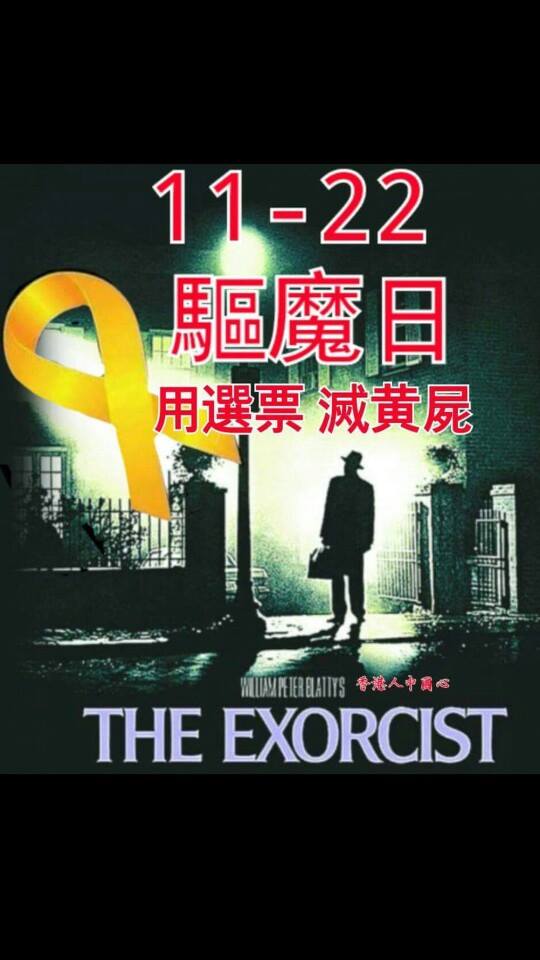
November 22
Day of Exorcism
Use your vote to destroy the yellow zombies
(South
China Morning Post) Elections? In Hong Kong? No, not to elect the
Chief Executive but here are four good reasons to care about the polls on
Sunday. November 21, 2015.
Some 935 candidates are in the fray
fighting for 431 seats in the district council elections that will take
place across the city on Sunday. Voters will decide on their choice of
district councillor, and hereÆs why the polls matter:
1. The First Post-Occupy Political
Temperature Taking
Sunday will be the first post-Occupy
elections and could reshape the political landscape.
The 79-day Occupy protests took place last
year from September to December and left the city deeply divided
politically.
In June this year, legislators rejected the
governmentÆs proposal for political reform û the issue that sparked the
protests in the first place. The failed proposal had stipulated that only
nominated candidates û up to three û could run for the cityÆs top position
of chief executive in 2017.
Pan-democratic groups said that after the
protests and the reform package rejection, the movement would remain strong
and represent a season of political awakening. The thinking went that more
Hongkongers would be encouraged to vote in support of pro-democracy
candidates.
Beijing-loyalist groups argued otherwise:
they said many Hong Kong voters would vote in support of pro-establishment
candidates, weary of political mudslinging post-Occupy.
More than 40 candidates either
declared they hailed from new groups as a result of Occupy or were politically
awakened by the 79-day sit-ins. They included doctors, accountants, IT
professionals, financiers, the owner of an adventure-sports business, two
chefs and a university student.
They
vowed during their campaigns to spread the same ôbottom-upö community
planning spirit that inspired them during last yearÆs protests, also known
as the Umbrella Movement.
SundayÆs results could show whether the
pan-democrats or the pro-establishment camp was right about the effect of
the Occupy movement on the cityÆs political landscape.
2. The first all-elected seats
election
Note that district councils serve to advise
the government on matters affecting residents in the district and the
provision of public facilities within the district.
Number of seats: 431
Number of candidates received: 935
Number of uncontested constituencies: 68
867 candidates are contesting 363
constituencies
New this year: All appointed seats were
scrapped, except for 27 ex-officio seats reserved for rural leaders in the
New Territories.
In 2011, only five out of 102 appointed
district councillors gave up their seats and stood for the direct election.
But as the government announced that all appointed seats would be scrapped
by the end of this year, 13 out of 68 district councillors appointed in 2011
decided to run for a directly-elected seat.
Some appointed councillors argued that,
with their professional and business background, they would continue to make
their districts a better place. The election will decide whether voters,
empowered with a say, agree with them.
3. First big hint of how two
looming political battles will shape up
The election results will influence the
Legislative Council election next year, and the chief executive election in
2017.
District councillors are eligible to
nominate their colleagues to run for five ôsuper seatsö in the Legco poll in
September, and to run for 117 seats in the 1,200-strong Election Committee,
which will elect the cityÆs chief executive in March 2017.
The ôsuper seatsö are officially known as
the District Council (II) constituency, but theyÆre so nicknamed because
they have a citywide ballot of more than 3 million voters, several times
larger than the electorate in the five geographical constituencies.
4. ItÆs about your money
District councils have the power to decide
on the use of large sums of taxpayersÆ money allocated by the government for
local level improvements.
And some councillors can come up with wacky
ideas, so watch out. In 2013, for example, the Tsuen Wan District Council
faced a barrage of criticism after it was revealed that it spent HK$766,000
of public money to build a goose statue in Sham Tseng in honour of its
famous roast goose dish, and endorsed a HK$1.5-million project to build a
giant butterfly statue at Chuen Lung to grace the slopes of Tai Mo Shan.
Since then, district councillors promised
they would spend taxpayersÆ money more wisely, especially after Leung
announced the Signature Project Scheme, under which each of the 18 district
councils approved a one-off grant of HK$100 million to improve neighbourhood
facilities. All the projects were to be proposed, discussed and agreed on by
district councils.
Another controversy: In August, the Tai Po
district council was criticised as its plan to build a HK$12 million public
square in Tai Po was lambasted as a local answer to Tiananmen Square.
Some pro-democracy candidates said they
hoped to win and stop public money from being misused or used without
sufficient consultation.
Apart from the signature project scheme,
district councils are entitled to initiate, endorse and manage minor works
in their districts that cost no more than HK$30 million each, under the
District Minor Works Programme. In the present financial year, HK$340
million was earmarked for the programme.
ItÆs your money, so you should care. And
yes, vote wisely.
Internet comments:
- A genuine and sincere Yellow
Ribbon could easily answer those five questions:
1. Yes. I support the defense of
Hong Kong's core values. Therefore I support Occupy Central.
2. Yes. I oppose the police using excessive
force (such as using tear gas against unarmed civilians and beating
Ken Tsang in a dark corner of Tamar Park).
3. Yes. The young people are exercising
their freedom of speech as guaranteed under the Basic Law.
4. Yes. Same as (3).
5. Yes. Filibustering is in accordance with
the existing procedures/rules/regulations of the Legislative Council.
So how hard is it?
- If it is so easy, then why
didn't the 193 pan-democrats answer? While all these answers are genuine and
sincere, the majority of the voters do not approve. If they publicly take
these positions, they will be voted out.
- They will give these
answers -- after the district council elections are over. They will re-iterate
those answers until the 2016 Legislative Council elections approach. Then they
will develop amnesia again. Or they will say that these are complicated issues
that cannot be dealt with by short answers. After those elections, they will re-iterate those
answers.
- You could
counter with 5 questions for the pro-establishment candidates:
1. Do you support the August 31
2014 resolution of the National People's Congress Standing Committee on
constitutional reform?
2.
Do you support the police use of tear gas against unarmed civilians on
September 28, 2014?
3. Do you oppose the appointment of Johannes Chan Man-mun as pro vice
chancellor of staffing and academic resources at Hong Kong University?
4. Do you oppose the elimination of the
existing ordinances that automatically appoints the Chief Executive as
the chancellor of ten institutions of higher learning in Hong Kong?
5. Do you think of yourself as more
Hongkonger or more Chinese?
Will Blue Ribbons answer?
- Well, that's easy:
1. Yes. I support the August 31 2014
resolution because the people of Hong Kong will get one-person-one-vote
and that is infinitely better than leaving the decision in the hands of the
1,200-person election committee.
2. Yes. Tear gas is used around the rest
of the world to stop chaos without using deadly force.
3. Yes. I believe that such matters should
be decided by the Hong Kong University council whose members made a
well-considered decision. I support true autonomy and
self-determination.
4. Yes. All ordinances are created by men
and can be amended by men. But if not the Chief Executive, then who? We
cannot eliminate the ordinances because some people don't like the
current Chief Executive and leave a vacuum for the chancellor. I would
like to listen to the proposed alternative first. I have heard nothing
so far.
5. I am a Chinese person living in Hong
Kong.
- Here is another list for
pro-China candidates:
1. Do you support the Chinese
Communist Party?
2. Do you
support the slaughter of 1,000 students on Tiananmen Square on July 4,
1989.
3. Do you
oppose foreign forces? If so, does any family member of yours have
foreign passports?
That's easily answered as well:
1. Yes. I support the Chinese
Communist Party because of the progress that they have made since 1980. I
cannot imagine the Hong Kong Democratic Party or Civic Party achieve such
rapid
progress.
2. With due
respect, the number 1,000 is fantasy. To quote Leon Lai, "I do not
answer hypothetical questions."
3. Yes. I oppose foreign forces
interfering with Hong Kong because I believe in
self-determination/autonomy/sovereignty. If any of my family members has
a foreign passport, he/she is exercising his/her freedom to choose so as
guaranteed by the
Universal Declaration of Human Rights.
- Do you want to see a re-run of
'students' stopping ambulances in order to carry out 'inspections'? On
this Sunday, you can decide for yourself.
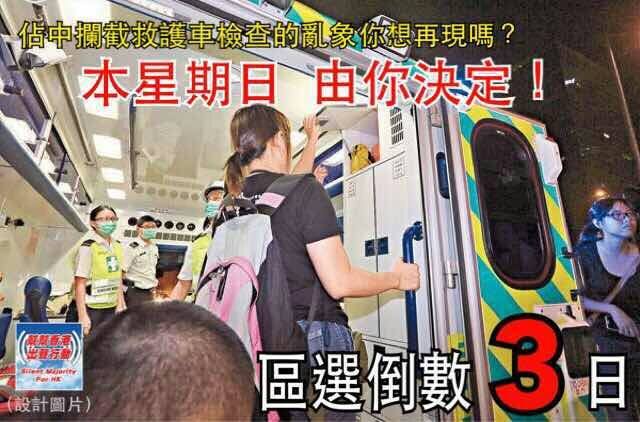
- Do you want to see a re-run of 'students'
having hot-pot dinner in the middle of the main boulevard? On this Sunday,
you can decide for yourself.
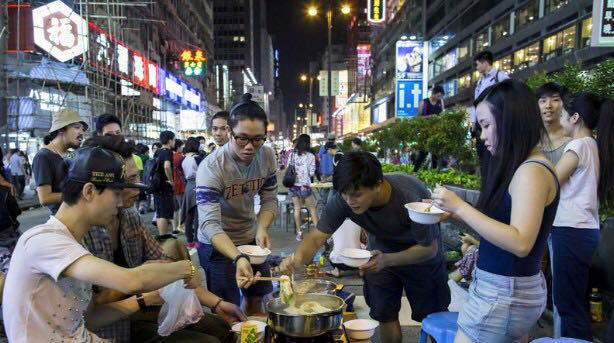
- (Hong
Kong Free Press) November 20, 2015.
With the District Council elections just
two days away, the Democratic Party is urging supporters to vote ôso as
not to let Leung Chun-ying win a second term.ö
At a press conference, Democratic Party
founding leader Martin Lee Chu-ming said that a lot of voters may believe
that District Council elections are not important. However, if the
pro-establishment camp gain more seats than in previous years, Chief
Executive Leung Chun-ying could win the approval of Beijing and win a
second term, Apple Daily reported.
ôIf you donÆt want him to stay [in power], everyone please come out and
vote.ö
He also asked voters belonging to
districts in which the candidates were automatically elected due to a lack
of competition, to hop over to the neighbouring districts and support the
party.
Internet comments:
- The logical basis is quite tenuous.
The
election committee gets to vote for the Chief Executive. Out of
1,200 committee members, district councilors account for 121 only (10%).
If the Democratic Party had voted for
the constitutional reform bill in June this year, Hong Kong would have
one-person-one-vote for the 2017 Chief Executive. But they vetoed the
bill and we are back to the 1,200-person election committee. So if CY
Leung re-elected, you can blame the Democratic Party among many others.
- If not CY Leung, then it is a clone
with a different name. What can the Democratic Party do after
squandering away one-person-one-vote?
- The Democratic Party supported Occupy
Central, which went on for 79 days without realizing any of its intended
goals while inflicting hurt and pain on people's livelihood. Given this
lapse in judgment, why would voting for the Democratic Party reduce the
chances of CY Leung being re-elected?
- You vote for a District Councilor who
will take care of district affairs. You don't want a district councilor
busy about electing the Chief Executive and ignoring district affairs.
- The entire Democratic Party press
conference lasted 15 minutes. Martin Lee still managed to show up late
and depart early. He doesn't even believe in this himself.
- Wan Chin's strategy
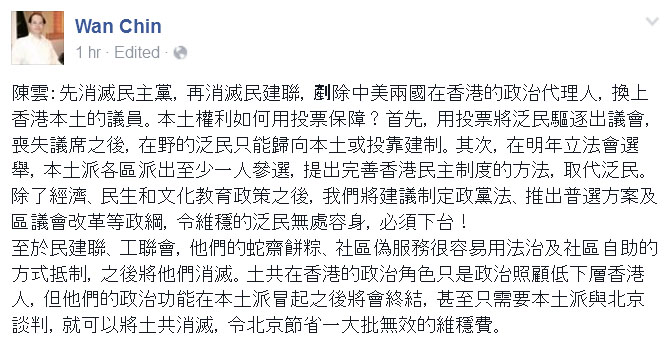
Wan Chin: We will destroy the Democratic Party first, then destroy the
DAB. We eradicate the agents of the United States and China in Hong Kong and
replace with Hong Kong localist councilors. How are localist rights
guaranteed through voting? Firstly, we use our votes to sweep the
pan-democrats out of the councils. After they lose their council seats, the
pan-democrats can either surrender to the localists or the establishment.
Next, in the 2016 Legislative Council elections, the localists will field at
least one person per district and propose a perfect system for Hong Kong
democracy to replace the pan-democrats. Apart from economy, livelihood,
culture and education policies, we will recommend introducing legislation on
political parties, universal suffrage and district council reforms. This
will leave the pan-democrats with no place to go except to exit!
As for the DAB and FTU, their "snake
banquets, vegetarian dinners, moon cakes and rice dumplings" and fake
community service will can easily be taken over by rule-of-law and community
self-help methods. We will eradicate them. The political role of the Hong
Kong communists is to take care of lower class Hongkongers politically.
Their political function will be terminated after the rise of the localists.
When the localists begin direct negotiations with Beijing, the Hong Kong
communists will be gone. Beijing can save a lot of money on the ineffective
stability-maintenance fees.
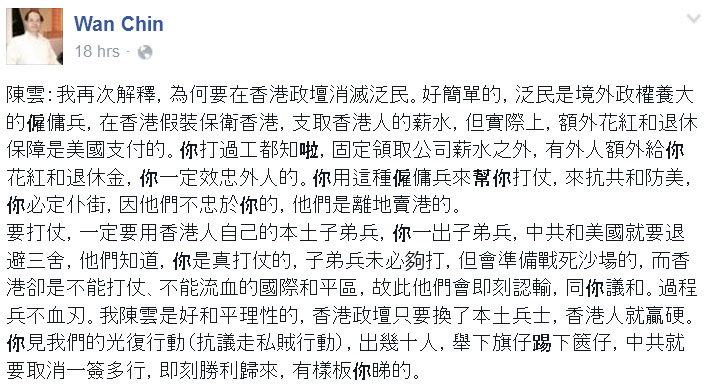
Let me explain one more time about why it
is necessary to eradicate the pan-democrats from Hong Kong politics. It is
very simple: the pan-democrats are the mercenaries for foreign powers. They
pretend to defend Hong Kong and they get paid by the people of Hong Kong. In
practice, they receive bonuses and retirement benefits from the United
States. If you have worked before, you know that if outsiders pays you
bonuses and retirement over and above your company pay, you will be loyal to
those outsiders. When you use such mercenaries to help you to fight against
the Communists and the Americans, you will be defeated for sure, because
they will be disloyal and they will betray Hong Kong.
If you have to fight, you must use local
Hong Kong soldiers. As soon as you send out the local Hong Kong soldiers,
the Chinese Communists and the Americans will flee, because they know that
you are serious about fighting. The local Hong Kong soldiers may not win the
war, but they are ready and willing to die on the battlefield. Hong Kong
must not be baptised by war, because it is an international area for peace.
Thus, the outside forces will concede and negotiate a peace with you. The
entire process will see no bloodshed. I, Wan China, loves peace and reason.
If the local Hong Kong soldiers take over Hong Kong politics, the people of
Hong Kong will win for sure. You can see in our Reclaim movements (against
the smugglers) that all we did was to send out several dozen people, raise
some flags and kick some luggage cases, and the Chinese Communists
immediately canceled the multiple visit permits to give us a victory. This
is a template for you to examine.
Internet comments:
- Since very few of the 431 districts
have localist candidates, Wan Chin is in fact saying to vote for the DAB/FTU
this Sunday, in order to inflict maximum damage on the pan-democrats.
- This does not clarify the big question marks around Wan Chin -- Is he
serious? is he a prankster? is he mentally ill? or is he a Communist
agent?
(Hong
Kong University Public Opinion Programme) November 19, 2015. POP
interviewed 1,052 Hong Kong registered voters between October 29 and 4
November 2015 by means of a random telephone survey conducted by real
interviewers.
| |
2003 |
2007 |
2011 |
2015 |
| Proportion of voters who
planned to vote in DC election |
74% |
76% |
66% |
71% |
| Have decided which
candidate to vote for |
37% |
47% |
37% |
30% |
| Knew which political camps
are running for election at local district |
75% |
76% |
80% |
73% |
| Main factor: platform and
political alignment |
35% |
36% |
47% |
41% |
| Main factor: past
performance |
47% |
50% |
40% |
33% |
| Main factor: personal
background and performance during election |
3% |
3% |
4% |
6% |
(Hong
Kong Free Press) November 19, 2015.
A survey by the University of Hong Kong has
shown that a large majority of registered voters intend to cast their
ballots at the district council elections on Sunday, but the amount of
voters who have decided which poll candidate to vote for has decreased.
The Public Opinion Programme of the
University of Hong Kong (HKUPOP) interviewed 1,052 registered voters between
October 29 and November 4. Results showed that 71 percent of respondents
plan to voteùup five percent from the same survey in 2011ùbut the proportion
of those who have already decided how to vote has slipped seven points down
to 30 percent.
According to HKUPOP Research
Manager Frank Lee,öThis means that the turnout rate in the coming election may
be higher, but the effect of loyal voters may weaken.ö
Around 73 percent of the registered voters
surveyed said they know which political camps are running for office at the
local level.
CandidatesÆ platform and political
alignment were deemed the decisive factor for 41 percent of interviewees; 33
percent prioritised past performance and six percent emphasised personal
background and campaign performance.
ôPeople continue to value the candidateÆs
political background, which may be related to the recent political
environment,ö Lee said.
HKUPOP will also conduct exit
polls on election day, November 22.
(SCMP)
November 19, 2015.
The turnout rate for SundayÆs district
council elections is expected to be higher than the 41.5 per cent for the
2011 election, after a University of Hong Kong survey found 71 per cent of
registered voters interviewed intended to vote û up 5 percentage points from
a similar survey four years ago.
However, with a wider choice of parties,
pollsters also discovered that only 30 per cent of the 1,052 voters had made
up their minds about which candidate they would vote for û 7 percentage
points lower than in 2011.
In a statement, HKU Public Opinion
Programme research manager Frank Lee Wai-kin said: ôThe turnout rate in the
coming election may be higher, but the effect of loyal voters may weaken.ö
Political scientists had said that since
new groups formed in recent years would be taking part in the poll for the
first time, older parties might find it harder to retain their votersÆ
support.
However, Democratic Party lawmaker and Wong
Tai Sin district councillor Wu Chi-wai said it was difficult to say whether
the effect of loyal voters was weakening.
ôPeople might only be more cautious about
public opinion surveys and want to hide their view from pollsters,ö Wu, 53,
told the Post. ôBased on the survey, I can only say it is still possible to
change votersÆ minds in constituencies over the next three days. But there
are 400 constituencies around the city and they are all so different. It is
difficult to draw conclusions at this point.ö
WuÆs sole rival in the King Fu constituency
is Wong Chun-kin, also 53, of the Beijing-loyalist Federation of Trade
Unions.
The HKU survey also found that 41 per cent
of voters consider candidatesÆ platforms and political backgrounds to be the
most important for them, while 33 per cent said candidatesÆ past performance
was more important.
(EJinsight)
November 20, 2015.
As Hong Kong prepares for district council
elections, a survey has shown that more people are now keen to vote in the
local polls compared to the previous such exercise in 2011.
According
to the University of Hong KongÆs Public Opinion Programme (POP), 71 percent
of respondents said they will vote in SundayÆs elections.
The figure marks an increase of 5
percentage points from the voting level in the previous district council
contest four years ago, Apple Daily noted. However, the percentage of voters
who said they knew the candidates in their district fell to 73 percent, from
80 percent in the last election. Also, only 30 percent of the respondents
said they had already made up their minds about who they will vote for. That
compares to 37 percent in a previous survey done ahead of the 2011 election.
For the latest survey, HKU researchers
interviewed more than 1,052 registered voters between Oct. 29 and Nov. 4.
Frank Lee, Research Manager of POP, said the turnout rate in SundayÆs
election may be higher, but the effect of loyal voters may weaken.
Among various factors under consideration,
41 percent of the respondents said they will mainly take into account
candidatesÆ political platform and alignment, while 33 percent indicated
that their chief deciding factor will be the candidatesÆ service record. The
figures mark a decline of 6 and 7 percentage points respectively from 2011.
Six percent of the respondents said they
will focus mainly on candidatesÆ individual background and performance in
the election campaign, up 2 percentage points from the last election. People
continue to value the candidatesÆ political background, which may be related
to the recent political environment, Lee noted.
Internet comments:
- Here are the historical
turnout rates versus HKUPOP poll responses.
| |
2003 |
2007 |
2011 |
2015 |
| Proportion of voters who
planned to vote in DC election |
74% |
76% |
66% |
71% |
| Actual Voter Turnout |
44% |
39% |
41% |
- |
| Total number of voters |
2,384,181 |
2,958,953 |
2,989,180 |
3,693,492 |
In the last 3 elections,
the highest poll number ended up with the lowest actual turnout
the middle poll number ended up with the highest actual turnout
the lowest poll number ended up with the middle actual turnout.
I don't see any patterns here.
You cannot take the HKUPOP
number and apply a simple discount factor based on 2011 to it, as in
estimating 2015 turnout to be 41 x 71 / 66 = 44%.
If you did that to 2003, you will get 41 x 74 / 66 = 46%, which is okay.
If you did that to 2007, you will get 41 x 76 / 66 = 47%, which is very wrong.
- If you want to extrapolate from
2003/2007/2011 to 2015, you are making the assumption that "other things
being equal." The other things are not equal here. The change factors
include: Occupy Central; umbrella soldiers; many more first-time voters
(both young and old).
-
Related link:
An
Analysis of a Hong Kong District Council Election Exit Poll
(2013/11/09)
- (Apple
Daily, November 20, 2015) Lingnan University Public Governance
Programme research director Li Pang-kwong estimates that the pan-democrats
have a chance to win a majority in the district council elections because
people are angry after Occupy Central. He believes that voter turnout will
be higher than 2011.
- Why is there suddenly a surge
in registration of elderly voters? They were present all along but never
bothered to register to voter. Now they are showing up en masse. The
first explanation is that the elderly people are now registering to take
revenge against any pro-Occupy candidates at the voting booths. The second
explanation is that the elderly people are mostly anti-Occupy and they are now
registering to support the anti-Occupy candidates. It is known that the elderly
(both new and old registered voters) are opposed to Occupy. So the
first explanation is more plausible.
(Hong
Kong Free Press) November 18, 2015.
Hong Kong fans booed the anthem they share
with China on Tuesday while some turned their backs and held up ôbooö signs
in a show of defiance before a crunch World Cup football qualifier with
their mainland rivals. Home supporters also swore at the visiting Chinese
supporters and showed them their middle fingers in a rowdy start to
proceedings at the sold-out, 6,000-seat Mong Kok Stadium.
Loud jeers rang out during the ôMarch of
the Volunteersö anthem, which the semi-autonomous territory shares with
China, and held up white signs saying ôbooö in English ù following warnings
against audible jeering.
The joint 2018 World Cup and 2019 Asian Cup
qualifier follows last yearÆs ôUmbrella movementö pro-democracy protests
which gripped the city and underlined discontent over BeijingÆs rule. The
fans have been strictly segregated, using separate entrances and even
different toilets, in a bid to head off any potential trouble in a district
which was one of the centres of the pro-democracy protests.
ôBecause we donÆt like the Chinese national
anthem, we have to go against it,ö Hong Kong student Jerry Wong, 20, told
AFP. ôBecause Hong Kong is not part of China, I donÆt feel like I am
Chinese.ö The booing was also in defiance of orders from world body FIFA,
which fined the Hong Kong Football Association after fans jeered their own
anthem at previous qualifiers.
Chinese supporter and government worker Fan
Yufeng, 33, who crossed the border to watch the game, said the spectators
who showed anti-China feelings did not speak for all of Hong Kong. ôThey
only represent a small portion of Hong Kong,ö he told AFP.
Local media reported that 1,200 police
officers would be on standby for the match, or about one for every five fans
at the stadium.
But despite tensions between the fans,
after the anthem both sides held a momentÆs silence to commemorate the
victims of the weekend attacks in Paris.
(SCMP)
November 18, 2015.
Thousands of fans packed bars and public
playgrounds around Hong Kong after failing to get tickets to the game. More
than 1,200 police were on standby - fearing trouble after Hong Kong fans
booed the national anthem at previous matches - and there was a huge
security presence but the overall atmosphere - though massively partisan -
was good-natured.
Hong Kong fans waited patiently for hours
to get in. The 500 China fans were let in by a separate entrance and all
were subject to ID checks, and extensive bag checks, while police dogs were
deployed to detect dangerous articles, according to officers.
Police patrolled the area segregating the
two sets of fans, while plain-clothes officers and the force's video team in
vests were also spotted.
Mainland fans sang patriotic songs
glorifying the Communist Party and local fans responded with rounds of
jeering and displaying signs that read "BOO".
A minute's silence was observed to mourn
the victims of the terror attacks in Paris.
Bars in Tung Choi street in Mong Kok did a
roaring trade. One bar manager said business was much better than usual "by
at least 70 to 80 per cent". She added it was full house. A waiter from
another bar said business increased by 50 per cent.
Casar Leung, 27, who watched on Mong Kok's
Soy Street, said: "This result shows Hong Kong's football is not as bad as
people always say."
More than 150 fans crammed a playground
near the University of Hong Kong in Pok Fu Lam where a projector was set up.
Savio Wai, an education administrator,
said: "It's a bit disappointing we didn't get the three points that are
super important for us. But we are proud of them. Our goalkeeper did great."
Train driver Him Lo, like many fans, donned
a red shirt and a headscarf emblazoned with "We are Hong Kong".
Asked about the atmosphere, student Rocci
Yue said: "It's normal for fans to voice support à Hongkongers are civilised."
(Oriental
Daily) November 18, 2015.
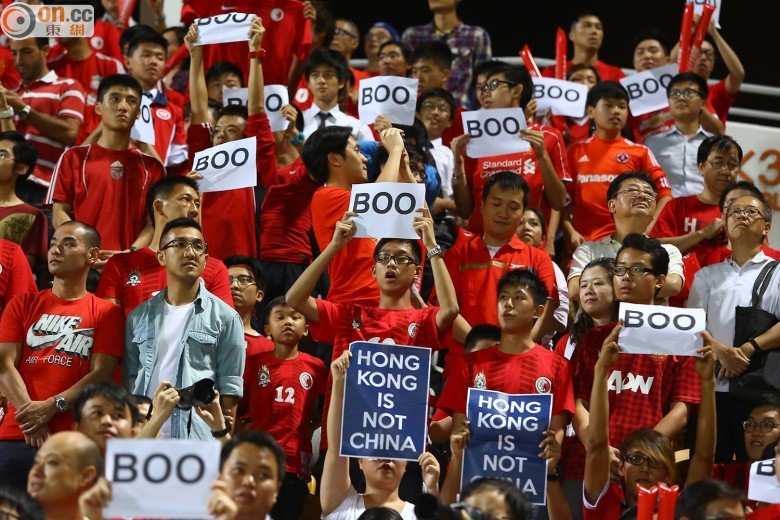
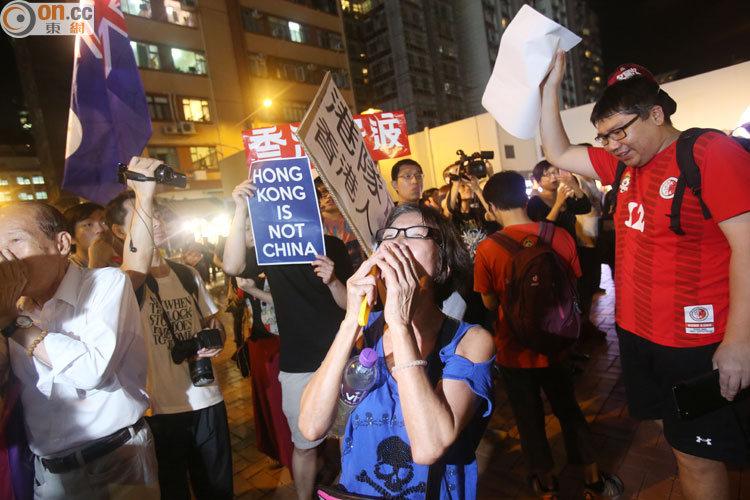
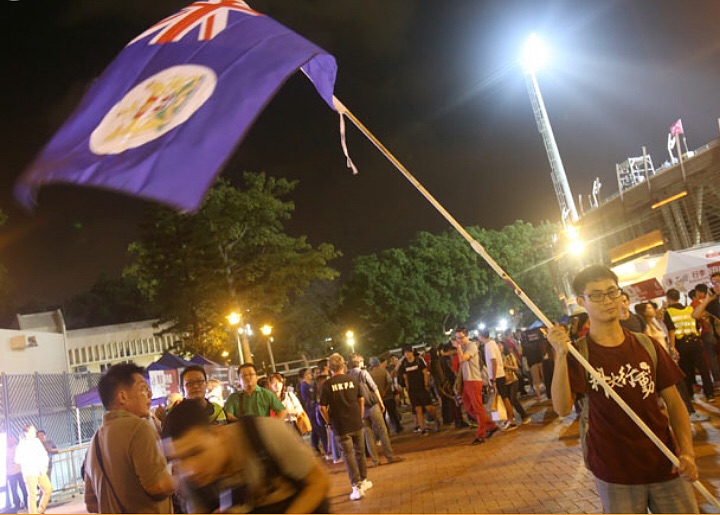
When the Chinese national anthem began,
many Hong Kong fans ignored the appeal and once against boo'ed. Some
fans held up "BOO" placards instead of making noise. Others turned their
backs on the playing field. Some fans collectively used foul language to
address Chinese player Zheng Zhi. Outside the stadium several dozen Hong
Kong fans also boo'ed.
Many localist groups took the opportunity
to promote Hong Kong independence. Several members of Hong Kong Priority
showed up wearing clothes with the British Dragon/Lion emblem and "I am
Hongkonger." UST Movement members waved the British Dragon/Lion flag.
(Wen
Wei Po) November 18, 2015.
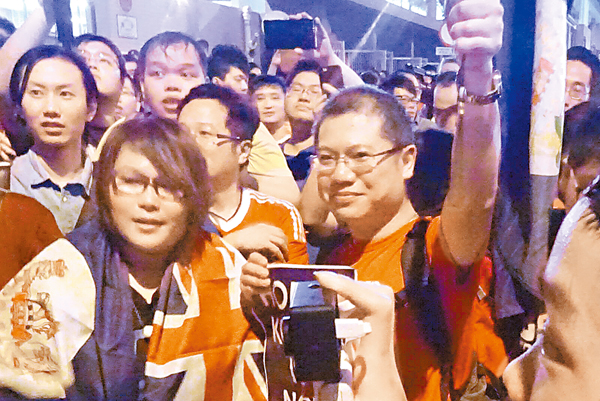
Koey (Hong Kong City-State) and Leung
Kam-shing (North District Parallel Imports Concern Group)
About two hours before the match started,
many radical group cadres led their members for a show of force in front of
the Mong Kok Sports Ground entrance. These included Civic Passion's Cheng
Chung-tai, DLLM Orchid's Barry Ma and "Hakka Boy," Shopping Revolutionary Ah
Cho, North District Parallel Imports Concern Group's Leung Kam-shing, Hong
Kong City-State's Koey etc. Most of them wore red t-shirts. At first Barry
Ma and others wore t-shirts with the British Dragon-Lion logo. Then they
changed into red t-shirts. The City-State people continued to wave the
British Dragon-Lion flag for Hong Kong independence.
Apart from Cheng Chung-tai and a few
others, most of these radicals do not have tickets. They didn't seem to mind
not being able to enter the stadium. Shortly before the match commenced, a
hundred or so went into the small park next to the stadium. Someone used a
large white cloth to project the live match video onto it. But the effect
was poor, so that most people watched their mobile phones.
After the match ended, these people
returned to gather near the exit on Flower Market Street. A large number of
PTU police officers watched over them. Under the leadership of Barry Ma and
others, the crowd began to sing the Chinese national anthem with obscene
lyrics. Cheng Chung-tai who is running in the Lok Tsui election and Leung
Kam-shing who is running in the Choi Yuen district were both in the crowd
and yelling obscenities.
(HKG
Pao) November 18, 2015.
After the match ended, there was a quarrel
between fans outside the stadium. Cheng Chung-tai and others rushed over
immediately and began to insult the police ("Evil police" and "Chinese
dogs") who were trying to maintain order. Cheng Chung-tai and Leung
Kam-shing led the crowd to chant "We are Hongkongers, not Chinese" and sing
obscene songs.
As these people departed, they used cursed
out any police officer that they saw with obscene language and gestures.
When they passed by Mong Kok Police Station, they banged on the wall and
cursed.
(Oriental
Daily) November 18, 2015.
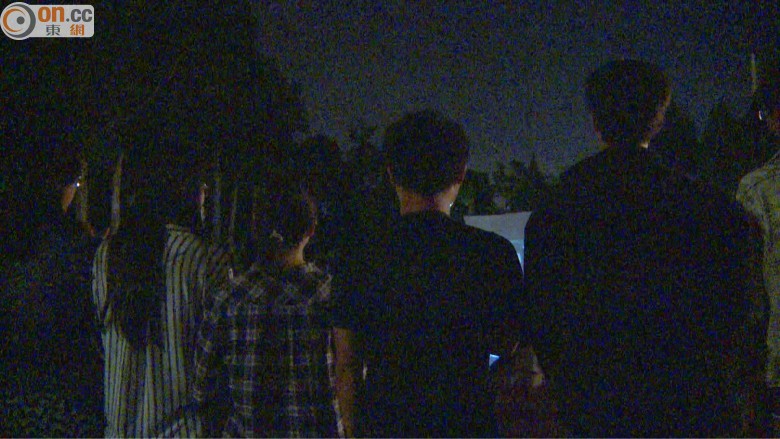
At Chinese University of Hong Kong, five to
six hundred students gathered on the Circular Plaza of New Asia College to
watch the live match broadcast. When the national anthem began, several
mainland students stood up in attention and sing, but the other students
boo'ed. This went for more more than 10 seconds. The booing drowned out the
singing.
(SCMP)
November 19, 2015.
Fans chanting "We are Hong Kong" at Mong
Kok Stadium on Tuesday night were not merely giving vocal support to the
boys in red as the city's soccer players battled to a valiant 0-0 draw in
their World Cup qualifier against China. They were also reflecting the
growing sense of Hong Kong identity that has developed in recent years.
For fans watching in the stadium or at live
screenings across this city, this was no ordinary soccer match. Many saw it
as an occasion to defend Hongkongers' pride in the face of a more assertive
and increasingly influential mainland.
The match, billed as Hong Kong's biggest in
decades, was a classic example of the nexus between sport, politics and
identity.
As chants of "Hong Kong superb" rang out,
some fans brandished banners with slogans such as "Hong Kong is not China",
making headlines overseas. Some held up signs saying "boo" during the
national anthem - after Fifa fined the local soccer association for audible
booing of the anthem at previous games.
"The Chinese side has no-one to blame but
the Beijing government's disrespect of our city," said one of those holding
a "boo" sign, Louis Cheng Wai-lun. "The football match à pretty much
epitomised the political struggle between the two places."
Anti-mainland tension has been on the rise
in recent years, for various reasons. The rising number of visitors from the
mainland and the uncouth behaviour of some of them is one factor. Politics,
too, plays a part - last year's 79-day Occupy sit-ins were spurred by a
restrictive framework set by Beijing for the election of the city's chief
executive by "one person, one vote" in 2017.
Ivan Choy Chi-keung, a Chinese University
political scientist and avid soccer fan, said the level of tension on
Tuesday was unprecedented in a cross-border fixture.
"It's noteworthy that the slogan 'We are
Hong Kong' was chanted in English, signifying the subtle link to the
colonial era," Choy said. "It amounts to a rebuttal of the call by some
mainland officials for decolonisation in Hong Kong."
He was referring to a call in September by
a former head of Beijing's Hong Kong and Macau Affairs Office, Chen Zuoer ,
to wipe out colonial holdovers.
Professor Ray Yep Kin-man, of City
University's department of public policy, agreed fans used the game to
express negativity to integration with the mainland.
The game was also a challenge for local
officials, anxious to keep the public onside without playing political
football and risking a red card from Beijing.
For Chief Executive Leung Chun-ying, this
meant a blog post after the match praising the "wonderful" and "exciting"
game but stopped short of expressing support for the local team.
His blog post won a mere few hundred
Facebook likes, while Financial Secretary John Tsang Chun-wah, a keen fan of
the Hong Kong team, drew more than 34,000 likes for a picture of himself
watching the game on a tablet computer during a visit to Romania.
Leung sidestepped questions from reporters
yesterday, saying it was "nothing special" to see Hong Kong sportsmen
playing the national team.
"As a Hongkonger and as a Chinese, I
support our fellow Hong Kong teammates as well as the sport development of
our country," he added on the sidelines of the Asia-Pacific Economic
Cooperation forum meeting in Manila.
Choy said Leung's ambiguous attitude would
only reinforce the perception he was not prepared to stand up for Hong Kong
when conflict arose with the mainland.
Tuesday's anti-mainland passions were a
stark contrast to the golden moment of China's soccer history in 2002, when
the team made the World Cup for the first and, thus far, only time.
More than 26,000 crammed Hong Kong Stadium
to watch on a big screen as China were thrashed 4-0 by Brazil in their match
held in co-host South Korea, all but putting them out of the tournament in
the first round. Some fans, who had queued outside the stadium for hours,
said "We are Chinese and this is the moment to show your true colours".
Amid the thundering shouts of "We are Hong
Kong", such sentiment sounded like a thing of the remote past.
(Hong
Kong Free Press) November 19, 2015.
Chief
Executive Leung Chun-ying remained coy when asked which team he supported in
Tuesday nightÆs FIFA World Cup qualifier between Hong Kong and mainland
China.
Speaking to journalists after his meeting with Chinese President Xi Jinping
on the sidelines of the Asia Pacific Economic Conference in Manila, Leung
tried to evade the question, saying that he and the Chinese leader did not
talk about football. But the
reporters pressed him on the matter, asking him why it was so sensitive to
reveal which side he supported.
ôThere
was, in fact, nothing too sensitive,ö Ming Pao Daily quoted Leung as saying.
He went on to say that members of the press never asked him which team he
supported when Hong Kong faced mainland opponents in past games.
The
question highlights the rising tension between Hong Kong residents and
mainlanders, and any statement from Leung about which team he supported in
the game could be given a political meaning by either side.
Critics have accused Leung of being beholden to Beijing, implementing its
wishes even at the expense of Hong Kong people. Leung said the Hong Kong
government has always been supportive of sports development and cited its
plan to build sports facilities at the former airport in Kai Tak. He noted
that the HK$20 billion multi-purpose sports complex will be built on a
valuable piece of land, which otherwise could have been used to ease the
housing shortage in the territory.
Speaking in a morning radio program on Wednesday, Hong Kong Football
Association (HKFA) chairman Brian Leung Hung-tak said government officials
are Hong Kong people as well and it is only fair that they support the local
team. ôA football match is no
more than a football match, there is no need to think too much about it,ö
the HKFA chief said.
He praised Hong Kong team coach Kim Pan-gon
for the strategies he deployed in the match, which ended 0-0, while thanking
the players for their unreserved dedication to the game and the enthusiastic
support of the home fans.
He said he had never
experienced before the kind of atmosphere at the Mong Kok Stadium where the
game was held, and he hoped more international competitions can be staged in
Hong Kong.
As to
why football fans were asked not to display sign boards with the slogan
ôHong Kong is not Chinaö by HKFA staff during the match, Leung said the
slogan was a little bit too political.
State-backed newspaper Global Times bewailed the behavior of some local fans
during the game, such as when they booed the national anthem, and urged FIFA
to impose heavier penalty on the HKFA.
(EJinsight)
November 20, 2015.
Three years into Leung Chun-yingÆs term as
chief executive, the attitude of Hongkongers toward Communist China has
shifted from subliminal phobia to firm separatism. And this sentiment has
now been given public recognition thanks to a crunch World Cup qualifier
against China.
For the first time in Hong KongÆs history,
de facto ôapartheidö was enforced by the cityÆs football association: there
were separate seats, entrances and even toilets at Mong Kok Stadium for Hong
Kong spectators and those from the mainland. The security measures were so
extraordinary that they would have been beyond peopleÆs weirdest imagination
if suggested just a few years ago.
But in the context of todayÆs Hong Kong,
such an implementation of ôapartheidö has become so apposite that even
BeijingÆs envoys and the government of the special administrative region
expressed no objections.
We saw some partial racial segregation in
Hong KongÆs earliest days, when The Peak and its vicinity were off limits to
Chinese and other ôcoloredö people, unless they were employed as helpers.
Some gentlemenÆs clubs and societies with membership restricted to
personalities from the upper class bear the hallmarks of apartheid as well.
The word ôapartheidö originates with the
Dutch colonists in South Africa, who segregated themselves from the black
and other ôcoloredö inhabitants, curtailing their associations, movements
and social and political rights. Different residential locations, schools,
toilets and even beaches were designated for people with different skin
colors.
But Hong Kong-style ôapartheidö between
locals and mainlanders is something that was never seen before the handover,
and it may gain further momentum, though how it will evolve remains to be
seen. The only thing we know for sure is that we can expect more unthinkable
outcomes like this one to occur thanks to the Leung administration.
Some Hong Kong fans still booed the Chinese
national anthem when it was played before the game on Tuesday.
The truth about the current national
anthem, March of the Volunteers (義勇軍進行曲), the theme song of a 1935 movie
about the Sino-Japanese War, is that itÆs not the first national anthem
adopted by the Communist Party. Just like the fact that the PeopleÆs
Republic of China is not the first country the party founded.
JapanÆs invasion of China got into full
swing in September 1931. Three months later, Mao Zedong proclaimed the
Chinese Soviet Republic, the start of the two Chinas, alongside the
Kuomintang-ruled Republic of China. The soviet republic had its own capital,
Ruijin (瑞金) in Jiangxi province, constitution, laws, army and even currency.
This act of separatism was obviously
immoral and treasonous amid the external threat facing the country.
The Internationale, a widely sung left-wing
battle cry that was already the national anthem of the Soviet Union, was
given the same national status by the Chinese Soviet Republic. The soviet
republic ceased to exist after Mao Zedong agreed to form a coalition with
Chiang Kai-shek to resist the Japanese aggression.
The greatest ironies were to follow.
While the KMT was confronting the Japanese
on its own, Mao and the Red Army hid in the vast rural areas of western
China most of the time and quietly built up their strength. Then after the
mainland fell to Mao, the Communist Party made the March of the Volunteers,
a song calling for all-out efforts to defend Chinese soil, the new national
anthem.
The writer of the songÆs lyrics, Tian Han
(田漢), was thrown behind bars during the Cultural Revolution on charges of
being a ôcounterrevolutionaryö. TianÆs
original lyrics were also edited to suit the partyÆs political needs.
On Tuesday and on several earlier
occasions, Hong Kong soccer fans were booing not the song itself but the
party and the communist republic that the anthem now represents.
Now, will the sportÆs worldwide governing
body, the FÚdÚration Internationale de Football Association, find fault with
Hong Kong again as it did last time? Not likely.
Booing oneÆs opponents is not uncommon at
all. El Clßsico is a term that refers to the rivalry between FC Barcelona
and Real Madrid C.F. Zealous supporters of the team from the capital of
SpainÆs autonomous region of Catalonia often boo the Spanish national anthem
and get into brawls with Real Madrid fans. Sometimes the rowdy encounters
even involve players and coaches.
Seldom has European footballÆs watchdog,
with an eye on ticketing and other revenues, taken punitive action against
the culprits, and thus FIFA is also unlikely to interfere. The worst
possible consequence the Hong Kong Football Association may face is another
small fine.
(SCMP)
November 21, 2015.
In the United States, candidates for
national office wear their sporting loyalties on their sleeves û and on
their heads. Donning a cap advertising their favourite team is such a
standard photo op, it is almost a clichÚ.
Barack Obama may be president of the union
of 50 states, with an official residence in the neutral ground of the
District of Columbia, but he has never been shy of his Chicago roots when it
comes to baseball. He is a Chicago White Sox fan. And when arch rivals the
Chicago Cubs had a chance to make it to the World Series, he didnÆt hesitate
to support them. ôCongrats @Cubs û even @whitesox fans are rooting for you!ö
he tweeted.
The current pretenders in the presidential
primaries are continuing this old tradition, flaunting their love for their
hometown sports teams even as they traverse the country trying to persuade
voters from Connecticut to California that they care passionately about each
and every one of them.
As for those vying for state or city
office, supporting the local team is a job requirement. George W. Bush did
one better. As a potential Texas governor, he bought a share in the Texas
Rangers, gaining him not just street cred but also a tidy bonus when the
club was later sold.
These politicians all know how sports can
be a useful arena to show their more human side.
What has all this got to do with Hong Kong?
A lot, if the events of the past week are any indication. The World Cup
soccer qualifying match between Hong Kong and China, coming in the wake of
tensions between the city and the mainland, was the talk of the town.
To avoid any ugly incidents, fans were
physically separated. Hongkongers had to produce their IDs to get in.
Mainlander numbers were kept to 500.
Ignoring warnings, Hong Kong fans booed the
national anthem, The March of the Volunteers. On the bright side,
the negativity was said to be more restrained than at previous games.
The home fans were overjoyed when the final
score was 0-0. The next day, there was a run on Hong Kong jerseys.
On the whole, it was a feel-good event for
the average Hongkonger. Politically and economically, there is no question
of Hong Kong dealing with Beijing on a level playing field. But on the
soccer pitch, the local boys showed they could still give residents
something to cheer about. A couple of contacts with affiliations to the
mainland told me they felt proud of the men in red.
But how did the local politicians react?
Chief Executive Leung Chun-ying was coy, saying he was ôimpressed by the
excellent performance of the Hong Kong team and national team playersö.
John Tsang Chun-wah, his finance secretary
and apparent rival, posted a picture of himself watching the match, but
couldnÆt bring himself to say anything more than ôexciting match!ö Well,
there was that effusive exclamation mark.
By comparison, Chief Secretary Carrie Lam
Cheng Yuet-ngor appeared positively ebullient before the game, saying she
hoped the Hong Kong team would ôplay a wonderful gameö û only to dial down
the enthusiasm immediately by confessing she was not a football fan and
would be too busy to watch the match.
Granted, the relationship between Hong Kong
and the mainland is complicated. There is nothing else like it in the world.
And it is prudent of Hong KongÆs leaders to manage carefully the toxic
anti-China sentiments that threaten to bubble over every now and then.
But that is exactly why they should have
done better. The match was a chance for leaders to showcase how people here
can strike a healthy balance between their Hong Kong and Chinese identities
û that you donÆt have to be jingoistic or xenophobic to be passionate about
Hong Kong. Instead, the signal they gave was that Hong Kong loyalties have
to be suppressed ostensibly for the larger good of China.
The irony is that Beijing probably would
not have taken offence if they had openly rooted for the Hong Kong boys.
Nobody could accuse the chief executive of being anti-China on substantial
matters. He could have surely afforded to show more pride in his home team
in a largely symbolic soccer match.
Such moments in a polarised society don't
come along often. Campaigns like ôAppreciate Hong Kongö are one way, but
being manufactured from the top, they lack the authenticity that fandom
provides.
One thinks back to Nelson Mandela and his
deft use of sporting and cultural symbolism. When he became the leader of
post-apartheid South Africa, one of the most divided societies in the world,
he embraced the 1995 Rugby World Cup as an opportunity to build unity.
It was a sport that the black population
associated with white nationalism, but he showed he was not going to bear a
grudge. At the same time, he flaunted his love for his own African and Xhosa
culture, in his dress, diction and dance.
The best political leaders know that their
identity û like that of their people û is never an either/or choice. They
show nous in picking the right one for the right occasion.
Hong Kong is hungry for moments to just be
itself even as it adjusts to the inevitability of ChinaÆs embrace. Win-win
chances are hard to come by. Politically speaking, last Tuesday in Mong Kok
Stadium, there was an open goal that Hong KongÆs leaders missed.
(SCMP)
November 24, 2015.
Fifa opened a disiciplinary investigation
into fans booing the Chinese national anthem prior to the Hong Kong-China
clash at Mong Kok Stadium last Tuesday.
The Hong Kong Football Association
confirmed in a statement that they received a letter from the world
governing body and were asked to provide a statement and evidence regarding
the incident that took place before the match, which ended up a 0-0 draw and
dealt a heavy blow to China's chances of qualifying for the 2018 showpiece.
"Today, the HKFA has received an official
letter from Fifa announcing that disciplinary proceedings have been opened
against the HKFA. The letter also confirmed that the HKFA appeared to be in
violation of the Fifa Regulations (article 65 ff of the Fifa Disciplinary
Code)," the statement said.
"The incident referred to is the booing of
the national anthem prior to the match. The HKFA is requested by Fifa to
provide a statement and any supporting evidence that the HKFA may consider
as relevant to the present case by December 1."
The HKFA also said the final decision will
be released by Fifa by the end of December.
The local governing body was fined by Fifa
after fans booed the Chinese anthem and threw a paper cup onto the pitch in
another World Cup qualifying match against Qatar in September.
The HKFA said after being fined last time:
"Fifa has warned the HKFA that any further infringements will lead to more
severe sanctions."
The most severe punishment could see Hong
Kong stripped of points or even disqualified from the World Cup qualifiers.
(Agence
France Presse) November 25, 2016
ôThe HKFA is disappointed, but not
surprised, to learn from Fifa that disciplinary proceedings are being opened
in respect of booing at the recent Hong Kong versus China football match,ö
said chief executive officer Mark Sutcliffe. ôThe HKFA will be submitting a
response to Fifa stating that the booing was carried out by a small section
of the crowd and pointing out the mitigating actions taken by the HKFA prior
to the match to ... avoid this situation,ö Sutcliffe said.
(SCMP)
January 14, 2016.
The Hong Kong Football Association has been
fined again by Fifa for booing the China national anthem.
The fine of 10,000 Swiss francs (HK$77,150)
was handed out for booing apparently heard in Shenzhen in September, at the
World Cup qualifier against China that finished 0-0. A small travelling band
of perhaps 2,000 fans attended that game and were heavily policed. Booing
was not noticeable from the press tribune at BaoÆan Stadium, but must have
been mentioned in the official disciplinary report.
Two previous punishments for booing the
anthem were also mentioned, among a lengthy list of global disciplinary
measures published by Fifa: a warning for an incident before the qualifier
against Bhutan at Mong Kok Stadium and a 5,000 francs fine plus warning for
ôimproper conduct among supporters + booing of national anthem by supporters
+ objects (small box - paper tetra pack ) being thrownö during the home
qualifier against Qatar.
The most recent qualifier, the 0-0 home
draw against China in November, was not mentioned in the Fifa report, though
booing from some fans could be heard at the start of the anthem before that
match before being drowned out by others. Other fans attempted to avoid
punishment by holding up signs that read æBooÆ.
Fifa confirmed after that game that
disciplinary proceedings had been opened against Hong Kong. It is unclear
whether the incident went unpunished or will be covered in future
disciplinary proceedings, but since punishments were handed out to other FAs
for incidents that occurred in matches on the same date, it seems the HKFA
escaped another fine or worse.
The FAs of Argentina, Mexico, Peru and
Uruguay were each fined 20,000 francs for homophobic chanting by their fans
under new anti-discrimination guidelines, with Chile receiving multiple
fines totalling 70,000 francs for four separate cases. The biggest single
punishment was dished out to Malaysia, who received a 40,000 francs fine and
a match forfeit after a qualifier against Saudi Arabia in September was
abandoned due to ôstrong use of pyrotechnic devicesö.
The Hong Kong FA has repeatedly pleaded
with fans to respect the national anthem, but admit there is little they can
do.
(EJ
Insight) November 15, 2017.
Local football fans again booed the national anthem before the start of an
Asian Cup qualifying match between the home team and Lebanon on Tuesday
night, Apple Daily reports.
Hundreds of spectators turned their backs on the pitch, hurled insults and
raised their middle finger as The March of the Volunteers was being played
at the Hong Kong Stadium.
Despite the booing, former justice
secretary Elsie Leung Oi-see said she does not see the need for the local
version of the anthem law to have retroactive effect.
Earlier, Leung had warned that the
Legislative Council could consider making it retroactive in the wake of such
display of disrespect to the national anthem.
The National PeopleÆs Congress Standing Committee earlier this month
inserted a new law banning the disrespect of the national anthem into Annex
III of the Basic Law, paving the way for the Legislative Council to pass a
localized version of the statute.
Most of the Hong Kong fans, wearing red jerseys, were seated on the east
side of the stadium.
As they booed the anthem, many covered their faces with their hands or
banners. Some even jeered at news photographers and warned them against
taking their pictures.
One of the fans who booed, surnamed Cheung, said the anthem is not worth
respecting. He said he is not worried if undercover policemen would take
pictures of him. ôWhatÆs done is done,ö he said.
Security measures at the stadium were apparently heightened. Six checkpoints
were installed at the entrances to prevent fans from bringing in banned
items, including bottles. Plainclothes police officers were seen patrolling
the stadium, with some using cameras to monitor the situation.
A secondary six student surnamed Wong said he came to support the Hong Kong
team. He said there was no need to pass legislation to force people to
respect the flag and the anthem. ôIf you respect people, people will respect
you,ö he said.
Brian Leung Hung-tak, chairman of the Hong Kong Football Association, said
the situation at the station was not as bad as before because the booing was
not too loud. Pui Kwan-kay, vice
chairman of the association, also said the noise from the spectators was not
as loud as during the game against Malaysia in October.
In the latest match, Hong Kong lost to Lebanon, 1:0.
(Mark
Sutcliffe's Blog) November 16, 2017.
A word on the booing
Quite frankly itÆs getting a bit tedious.
The fans who boo have made their point now and IÆm pretty sure that if there
hadnÆt been such interest shown by the politicians and in particular the
media, it would have stopped a long time ago. I canÆt read most of the
papers here but the ones I can read have stopped reporting on the football
and are solely interested in the crowd behavior before the match which of
course just encourages more booing. ItÆs a self-fulfilling prophesy, which I
am sure the media knows and relishes. Last night one media outlet even had
the temerity to broadcast the anthem live on TV from inside the stadium
despite the fact that they had no accreditation to do so. They were not the
approved broadcaster and should not have been showing a æliveÆ feed. ItÆs
disgusting really that a so-called professional organisation believes it is
OK to infringe the regulations so blatantly.
Another sad trend is what I will call the
æorchestrated anti-booing rent a crowdÆ, people who are apparently paid to
come and oppose those who are booing. I donÆt know who these people are or
who is paying them but they are clearly not there to watch the football.
They have no understanding of the game and even less interest. Last night I
watched as they sat through the entire Lebanon anthem. Personally I find it
more offensive to disrespect someone elseÆs anthem than your own. Someone
should teach both groups some manners. This situation is a sad indictment on
Hong Kong. Our beloved game is being hijacked (to the obvious delight of the
media) as a political tool by both sides in a polarized, fractured society.
ItÆs very sad that the action on the pitch is now seen by many as secondary
to what is happening off it. Please if youÆre not bothered about the
football, just stay away.
The HKFA will wait to see what action is
taken against us by the AFC, for it is us that will be penalized once again.
- Why is there an "orchestrated anti-booing
rent a crowd"? If there was no booing, nobody would have to rent a crowd. It
is because the HKFA is unable and/or unwilling to stop the booing that
someone had to take matters into their own hands. If the HKFA can stop the
booing themselves, the rent-a-crowd will disappear. The ball is passed back
to you, Mark Sutcliffe.
- The booing crowd does not care about Hong
Kong football either. They want the HKFA to be penalized. Fines don't mean
anything to them personally. They want the Hong Kong team be forced to play
behind closed doors, or forfeit matches, or even outright banned. That is
because everybody will blame China instead of them. Such being the case, the
HKFA is up shit creek without a paddle.
- Here is what Mark Sutcliffe's blog post
led to:
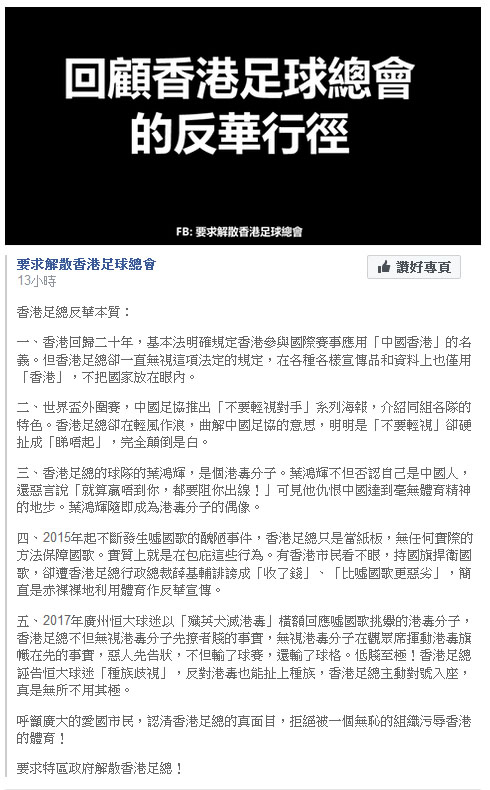
The Demand to Dissolve the Hong Kong
Football Association Facebook:
The Sinophobic positions of the Hong
Kong Football Association:
1. Hong Kong was returned to China
twenty years ago. Article 149 of the Hong Kong Basic Law states that Hong
Kong shall use the name "Hong Kong, China" in international sports. However,
the Hong Kong Football Association has been ignoring this legal requirement
and using just "Hong Kong" in their various promotional materials without
any reference to the nation.
2. During the qualifying rounds, the
Chinese Football Association issued a serious of posters entitled "Do not
underestimate the opponents" (see
#268) to showcase
their various opponents. The Hong Kong Football Association internationally
misinterpreted the meaning by switching "Do not underestimate the opponents"
to "Look down on the opponents."
3. Yapp Hung-fai, goalie of the Hong
Kong Association's representative team, is a pro-independence activist. Not
only does he deny that he is Chinese, but he also said to China: "Even if we
can't defeat you, we will stop you from advancing!" His hatred of China has
caused him to lose the sporting spirit. By doing so, Yapp is an idol among
pro-independence elements.
4. After numerous instances of the
national anthem being booed since 2015, the Hong Kong Football Association
has done nothing. For all practical purposes, the HKFA is provided a safe
haven for such behavior. When Hong Kong citizens got upset and came to hold
up the national flag and sing the national anthem, the Hong Kong Football
Association Chief Executive Mark Sutcliffe accused these people of being
paid and "worse than booing the national anthem." In this way, sports became
the medium for anti-China propaganda.
5. In 2017, the Evergrande (Guangzhou)
fans brought out a "Death to British dogs, destroy Hong Kong independence
(poison)" banner in response to the provocation of the pro-independence
elements who booed the national anthem. The Hong Kong Football Association
said that the Evergrande fans were engaged in "racial discrimination." This
shows that the Hong Kong Football Association takes the position that if you
oppose to separatism, you are a racist.
We call upon all patriotic Hongkongers
to recognize the true face of the Hong Kong Football Association and reject
this shameless organization from polluting Hong Kong sports.
- The booing of the national anthem at
international football matches in Hong Kong is a disrespectful act that is
causing social rifts. What is the organizer Hong Kong Football Association
doing about it? Nothing. Absolutely nothing.
Why? Because they shrugged their shoulders
and said that there is nothing that they can do. This is total rubbish. The
truth of the matter is that there is plenty that they can do.
First of all, the Hong Kong Football
Association needs to ask themselves: Why does booing the national anthem
only occur in football? How come its does not happen in other sports (such
as rugby, basketball, table tennis, swimming, etc)?
(Facebook
video) Here is the Hong Kong (China) rugby team standing at
attention and singing the Chinese national anthem at the 2015 Rugby Asia
Cup.
Here are some specifics that the Hong Kong
Football Association can (but won't) do:
(1) Booing the national anthem is injecting
politics into the sport, and will result in progressively severe sanctions
from the Asian Football Confederation (fines, behind-closed-doors matches,
forfeiture of points, etc). Rather than sitting passively for AFC sanctions,
why not actively do so yourself to show that you are completely serious
about putting a stop to the disrespectful behavior? Start by announcing that
any booing in the upcoming match will result in the next international match
being placed behind closed doors. You only have to do it once and the
behavior is guaranteed to stop thereafter. If anyone tries to boo again, he
will be lynched by the true football fans around him.
(2) Look at the (Facebook
video) of the Hong Kong rugby team. Respect for the national anthem
begins with the Hong Kong players themselves. Make them the lyrics and make
them sing proud and aloud. If a player refuses to sing the national anthem,
then he should not be representing Hong Kong (China). PERIOD.
Videos:
(dbc)
https://www.youtube.com/watch?v=Lv0gHR_UcSI The title of this news
report is: "After September 3, November 17 has also become the Memorial Day
for Victory in the War of Resistance against Fascism!" in the hearts of Hong
Kong fans.
(TVB)
https://www.youtube.com/watch?v=AEH6oGpe0q8 News report including
match highlights
(NOW TV)
http://news.now.com/home/local/player?newsId=158363 News report on
the booing of the Chinese national anthem
(Cable TV)
http://cablenews.i-cable.com/ci/index.php/VideoPage/news/470541/%E5%8D%B3%E6%99%82%E6%96%B0%E8%81%9E/%E7%90%83%E8%BF%B7%E5%85%A5%E5%A0%B4%E5%BE%8C%E4%BA%92%E7%9B%B8%E5%8F%AB%E5%8F%A3%E8%99%9F%E5%8F%8A%E5%A0%B1%E4%BB%A5%E5%99%93%E8%81%B2
(AFP)
https://www.youtube.com/watch?v=Tf5LCywZ99k
0:12 (Man) Fuck your mother!
(Epoch Times)
https://www.youtube.com/watch?v=GuN3kbWfbc8 Outside the stadium
(Speakout HK)
https://www.youtube.com/watch?v=9o2HTDrxnFA
(INT News Channel)
https://www.youtube.com/watch?v=k-8EI7KycRY News report
(INT News Channel)
https://www.youtube.com/watch?v=BhejdHq0Ka4 Booing the national
anthem
(Resistance Live Media)
https://www.youtube.com/watch?v=maNlxaLjlao Passing out "Hong Kong
is not China" posters to the spectators as they enter
(Resistance Live Media)
https://www.youtube.com/watch?v=bYIAW3fWhkY "We are Hong Kong"
chants
(Resistance Live Media)
https://www.youtube.com/watch?v=zJmpVrA4T18 "Boo"!
(Resistance Live Media)
https://www.youtube.com/watch?v=-WXbAFgUmb8 "We are Hong Kong" near
the big screen television near a park next to Mong Kok Stadium
(Resistance Live Media)
https://www.youtube.com/watch?v=0CeoH7Ul7O4 After the match, some
fans walked over to the Chiu Luen Minibus area to demand the police tow away
the illegally parked minibuses.
(Resistance Live Media)
https://www.youtube.com/watch?v=vdf50ts6CF4 At 915pm, some sports
fans saw a man taking photos. When asked, the man said that he was taking
photos on behalf of Ta Kung Pao/Wen Wei Po but he did not show a press pass.
The fans chased him all the way to the transformer station on Sai Yee
Street. The police escorted the man away.
(Resistance Live Media)
https://www.youtube.com/watch?v=ymZJA190s04 District council
candidates Cheng Chung-tai and Leung Kam-shing lead the chant of "Down with
the Communist Party" and foul-mouthed songs
(SocREC)
https://youtu.be/mtu9kVv3J4g A man is escorted away because people
suspect that he is a spy for the China Liaison Office to take photographs
for Ta Kung Pao/Wen Wei Po.
(Passion Times)
https://www.youtube.com/watch?v=XexdC7u1L70 Fans want to beat up a
Blue Ribbon who made provocative remarks to them in the children's
playground on Sai Yee Street.
(Ellis Kwong Wai Kwan)
https://www.youtube.com/watch?v=QeibvK_WFd8 Booing the Chinese
national anthem outside the stadium
(Chinese Football)
https://www.youtube.com/watch?v=ROhRcz3w4Kw Match highlights
(Chinese Football)
https://www.youtube.com/watch?v=5v8amAT4OXU Booing the national
anthem.
Internet comments:
- (Silent Majority Facebook) It is rare in
the world to see no sporting spirit inside a sports stadium.
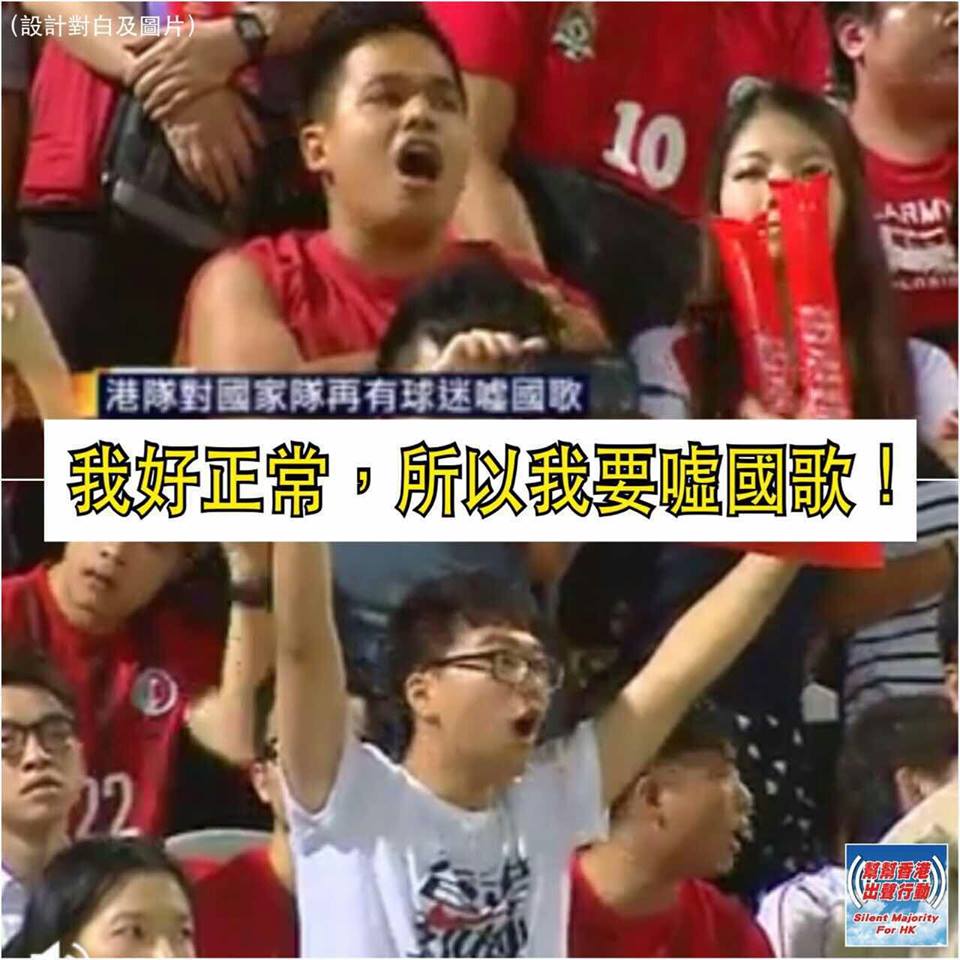
"I am very normal. Therefore I will boo the national anthem!"
- Can you in any way shape or form justify
this?
https://www.facebook.com/HongKongGoodNews/videos/977694755637794/
They are just chanting "Fuck! Fuck! Fuck! Fuck! Fuck! Fuck! Fuck! Fuck!
Fuck! Fuck! Fuck! Fuck!" and "Fuck your mother! Fuck your mother! Fuck your
mother! Fuck your mother! Fuck your mother! Fuck your mother! Fuck your
mother!"
- Chip Tso Channel
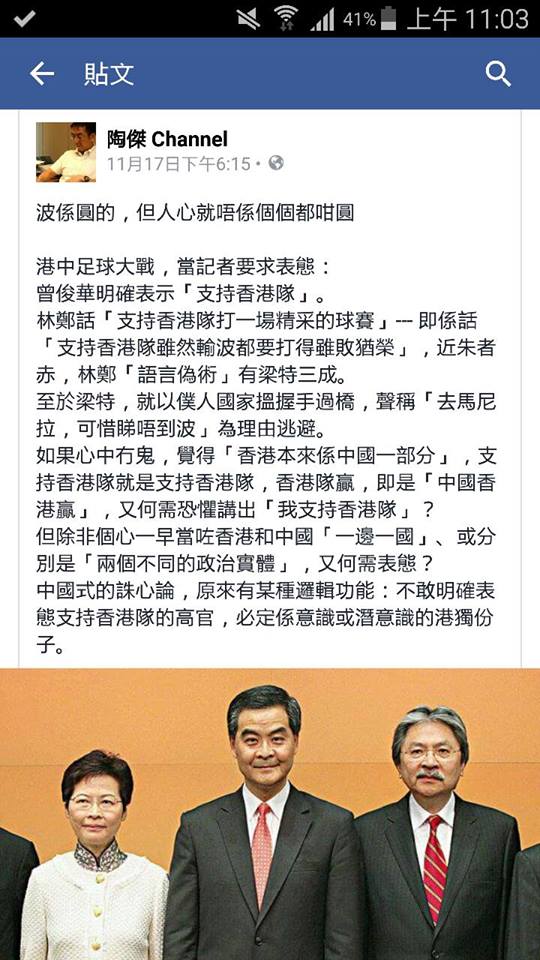
The ball is round but men's hearts are
not all round.
When the reporters want a statement of
preference for the Hong Kong-China match:
Secretary of Finance John Tsang said: "I support the Hong Kong team."
Chief Secretary Carrie Lam said: "I support the Hong Kong team to play an
exciting match" -- this means "I support to the Hong Kong team for having
good spirits even after losing this match" so she has been hanging around
the Chief Executive too long and she talks 30% like him.
As for Chief Executive CY Leung, he found the excuse of having to shake
hands at APEC as a client state. He said: "I have to go to Manila.
Unfortunately I won't be able to watch to match" as his excuse to avoid
answering the question.
If you are open-minded and you feel that "Hong Kong is a part of China), you
should support the Hong Kong team if you want to. If the Hong Kong team
wins, it is a win for Hong Kong (China). Why be afraid of saying "I support
the Hong Kong team"?
Unless of course you think that Hong Kong and China are "one nation on each
side" or "two different political entities," why do you need to state a
position?
This Chinese-style of dishonesty has a certain logical function: Those
senior government officials who dare not openly support the Hong Kong team
must be consciously or subconsciously Hong Kong independence elements.
- You can say that "I support the Hong
Kong team" or "I support the Chinese team" or "this has nothing to do with
my job" or "I don't even like soccer" or "why am I being forced to choose
sides? why can't I just want to watch a good and exciting game regardless of who
wins?" or "I am busy overseas on government business" or whatever, Chip Tso will find a way of criticizing you. As my response, I think I will
just quote what the Hong Kong fans always say:
https://www.facebook.com/HongKongGoodNews/videos/977694755637794/
"Fuck! Fuck! Fuck! Fuck! Fuck! Fuck! Fuck! Fuck! Fuck! Fuck! Fuck! Fuck!"
and "Fuck your mother! Fuck your mother! Fuck your mother! Fuck your
mother! Fuck your mother! Fuck your mother! Fuck your mother!"
- "Hong Kong Is Not China"? I checked the map:
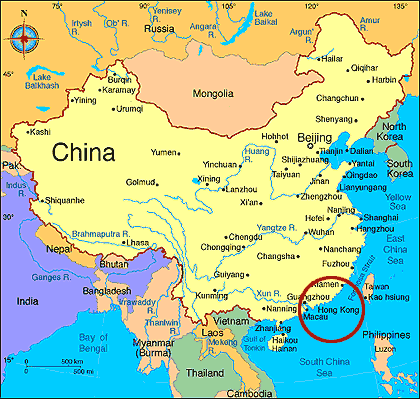
This statement is true: Hong Kong is just one little black dot whereas China is the
huge light-yellow-colored chunk in the middle of the map. In the same way, New York City is not the
United States, Osaka is not Japan, Marseilles is not France, Perth is not
Australia, etc. Everybody know this to be true. What then is the purpose of saying so?
- Which English-language genius came up with
this phrase? No wonder Vietnam has surged ahead of Hong Kong in terms of
command of the English language.
- Let me remind you just in case you don't know
or have forgotten:
"You are not your mother."
- When you have public signs in Hong Kong that
read: "Drink Don't Drive", this is the level of language competency you
expect.
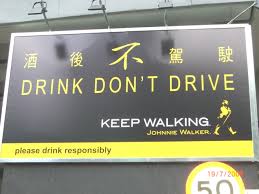
- This is Hong Kong-style English with its
unique characteristics, and it is indeed
different from American or British English. In like manner, Hongkongers also speak Hongkongese, which
is different from the Cantonese dialect with its unique characteristics.
What you regard as linguistic mistakes are actually creative inventions.
Unfortunately the rest of the world has yet to learn the Hong Kong-style
languages.
- But since Hong Kong is the center of the
universe, the rest of the world must and will eventually speak the Hong Kong
way.
- Or else Hong Kong will buy an aircraft
carrier and force the rest of the world to speak Hong Kong-style Cantonese!
- They should stick to "BOO". But it is not
universal. The Cantonese word is "噓" (sound of "hur").
"BOO" is almost not specific, because it could be directed against unsportsmanlike conduct, or skin color,
or whatever people don't like at that moment.
- "Hong Kong does not belong to China" or
"Hong Kong is not a part of China" may be better. But that becomes clearly
political. "Hong Kong is not China" could be taken to have cultural or other
meanings.
- I am totally disinterested in which soccer
teams (if any) are supported by which senior government officials. That's
their personal business and none of mine. There is no need for them to
pledge either allegiance or treason. I just don't care.
- Why should there be two teams coming from
the same country? This proves that Hong Kong is an independent sovereign
entity.
- The United Kingdom fields four separate teams: England, Scotland, Wales
and Northern Ireland. This proves that these are independent sovereign
entities. And Denmark fields Denmark and the Faroe Islands. This proves that
the Faroe Islands are an independent sovereign entity. You can keep on going
yourself with this homework assignment ...
- I did my homework. There are also the political powder kegs of Puerto Rico
and Palestine, which are FIFA members. People have been jailed or killed for saying
that they are independent nations.
- What do they teach in universities? When
the national anthem gets played and some people sing along, you use boo's to
drown them out. Is this the result of your refined and cultivated education?
- (Apple
Daily) Polytechnic University Social Policy Research Centre director
Chung Kim-wah said that it is normal for a senior government official
representing Hong Kong to say "I support the Hong Kong team." So when the
senior government official is afraid to say so, then how can the people of
Hong Kong believe that this government official will fight for the interests
of the people of Hong Kong with respect to the Central Government?
- Does saying "I support the Hong Kong
team" mean that the speaker will look after the interests of Hong Kong?
It's not what he says, it's what he does.
- Well, if CY Leung simply said: "I
support the Hong Kong team," they will say that he is insincere or that
the people of Hong Kong don't appreciate his support anyway. Then
they will say that he must attend the match instead of going to the APEC
meeting. And if he does attend the match, they will find something else to
pick on such as the lack of extensive funding for sports in Hong Kong. And
if he proposes to increase funding for sports, they will criticize them
for placing sports over livelihood issues (e.g. universal retirement
scheme). So why
should he pay any attention to you?
- Before this scholar makes criticisms,
he should fix up his hair first. And why that bitter look? Why is there so
much bile and hatred in him?
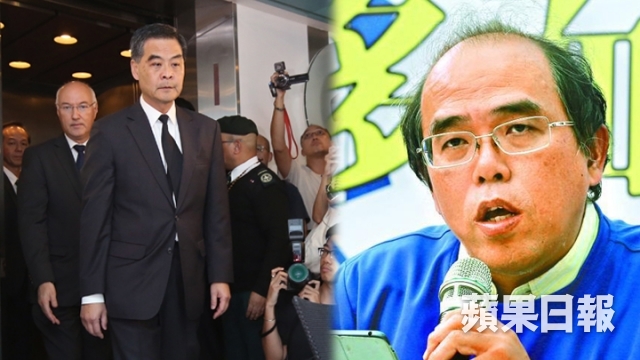
- If this scholar wants to have a good
research topic, then how about this: Wen Wei Po polled 193 pan-democratic
candidates in the district council elections -- Do you support Occupy
Central? None dared to answer. None. What is the political analysis of
this situation?
- Scholars want more interesting and
useful research projects, such as polling people and forcing them to
choose one and only one among these:
(1) I am Hongkonger but not Chinese
(2) I am Chinese but not Hongkonger
(3) I am Chinese Hongkonger
(4) I am Hongkonger Chinese
(5) I am Hongkonger first, Chinese second
(6) I am Chinese first, Hongkonger second
(7) None of the above
(8) Hard to say/not sure/refuse to answer
- A political scientist must clearly know
that there are multiple views on an issue. For example, some people
support the Hong Kong team, some support the Chinese team, some support
the German team and others don't support any team. As another example,
some people support Occupy Central and other people oppose Occupy Central.
So what exactly does "the interest of the people of Hong Kong" mean?
Either to support or not to support? If you support, you are working
for their interests and against the interests of those who oppose, and vice
versa. The only reason you talk that way is that you have clearly decided
that you (and only you) will make the determination of where the true
interests of the people of Hong Kong lie. Thus, you support the Hong Kong
team, you support Occupy Central, etc. And all those who disagree
with your determination can fuck themselves because they are Hong Kong
traitors.
- A Hong Kong citizen must support
the Hong Kong team? Why?
- It is a sad day when a Hongkonger is compelled to support the Hong Kong
team, for Fascism will have won.
- Hongkongers support Manchester United much more so than the local South China
club. Does
that make them unpatriotic?
- What kind of Hong Kong team is this anyway? Seven members (Festus Baise, Bai He,
Jean-Jacques Kilama, Sandro, Jack Sealy, Paulinho and Jaimes McKee) out of the 11
starters are outsider mercenaries who took jobs away from homegrown Hong
Kong talents. At least on the Chinese team, every player was born in China.
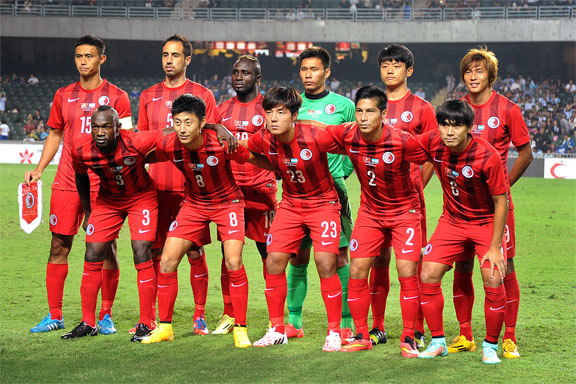
- The situation is that Hong Kong has one
away game left at Qatar on March 24, 2015. Meanwhile China has two home
games with Maldives on March 24, 2016 and Qatar on March 29, 2016. So far
China and Hong Kong have been defeating the minnow (Bhutan and Maldives),
they lose to Qatar and they tie each other. If at the end of the qualifying
round, Hong Kong and China are tied on points, the tie breaker will be on
goals scored. China has 21 goals and Hong Kong 13. To advance as
second-place finisher, Hong Kong must get some points from Qatar. Meanwhile
China should beat Maldives easily and they must get the same or more points
from Qatar.
- As Group C leader, undefeated Qatar has already qualified. How do you fix
the game with them? You can't offer them money because they are flushed with
oil cash.
- Postscript: China goes to the next
round while Hong Kong gets to stay home and masturbate.
- (The
Standard)
In the most contentious moment of the match,
Hong Kong goalie
Yapp Hung-fai made a double save to deny Yu Dabao in the 76th minute. Yapp could only
palm Yu's pointblank header straight back to the striker, whose
second-chance header deflected off the post and appeared to cross the line
before the goalkeeper clawed the ball back.
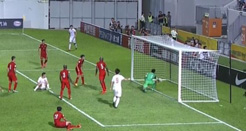
https://www.youtube.com/watch?v=ROhRcz3w4Kw (1:54)
- It is hard for me to support a Hong
Kong team whose captain is Yapp Hung-fai. When Yapp was asked about the
call (because he was the person who swatted the ball back out), he got
angry and said that it was a refereeing issue to which he won't respond.
Yapp lacks sporting spirit.
- When you have a photograph, you've got
the truth.
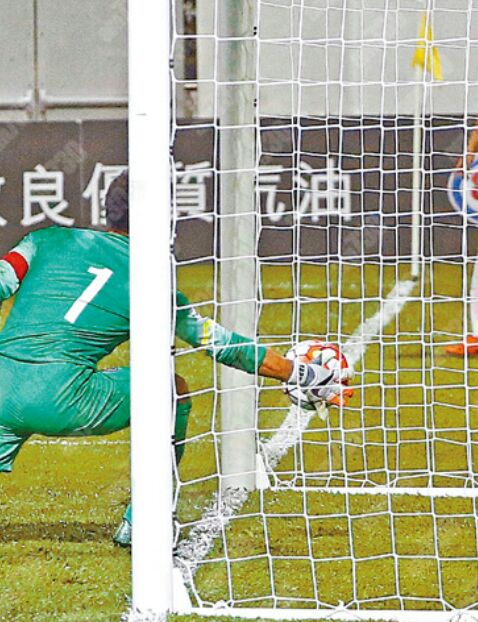
The question to Yapp is not: "Did the ball cross the line?" but "How do
you live with this lie the rest for your life?"
- Here is Yapp's Facebook with a photo of
himself kicking a Chinese player and a challenge to comment.
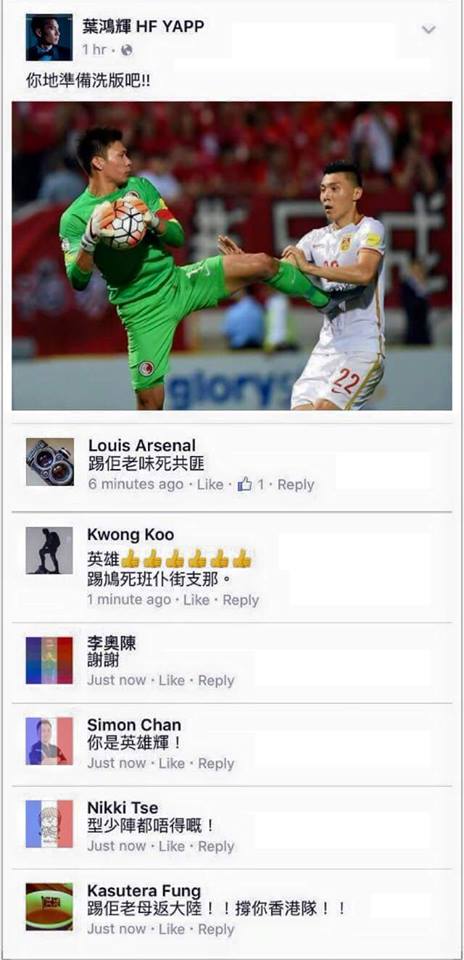
- Under normal circumstances, I might
consider supporting the Hong Kong team. But a small group of political
parties and media outlets have decided to inject politics into a soccer
game. If this whole thing is turned into a chance to increase Hong
Kong-China conflicts and physical assaults around the stadium, then I
respectfully decline to support anything around this match.
- As a soccer fan, a Hongkonger and a
Chinese, I have to say that I am not a fan of either the Hong Kong team or
the Chinese team. They both suck (海軍鬥水兵).
I am a Bayern Munich fan because I like to watch Neuer, Ribery, Lahm, Robben,
Mueller and Lewandowski. They are physically fit, they are skillful, they
are intelligent, they have brilliant tactics, they score beautiful goals. Thank you.
- One of these days, the Hong Kong team may be playing England. Then who
will the Hong Kong independence advocates support? If they wave the Union
Jack, they will be supporting England over Hong Kong.
- (Apple
Daily) With respect to the photo of Hong Kong fans holding up "Hong
Kong Is Not China" placards, Chinese goalie Wang Da-lei posted on Weibo: "As
for this photo ... CNMD (=Fuck your mother's)" and "I don't know politics. I
only know that I am Chinese and I am very proud to be Chinese. I love my
motherland! I and the ordinary Chinese have the same bright red hearts!"
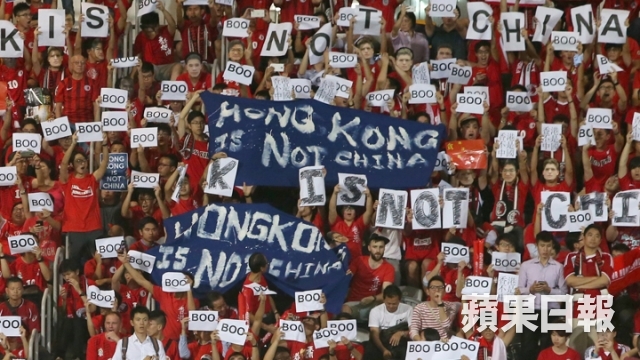
- TVB has been giving air play about the
political showdown for several months already. Why do they want amplify
the matter? The answer is very simple: they own the television broadcast
rights and they want to maximize the audience (and hence ad revenue from the
sponsor Panasonic).
- (Oriental
Daily) Chinese University of Hong Kong vice-chancellor Joseph Sung
Jao-yiu was not present at the site of the campus live broadcast of the
match. Therefore he missed out on what the students did. Apparently Sung
doesn't read newspapers either. Therefore he gave a speech at the CUHK
graduate ceremony a couple of days later to say: "Right now everybody thinks
that university students nowadays have become worse, because they quarrel,
they lack manners and they don't think about advancing themselves. This is
not the case for CUHK. People should not make sweeping statements ..." Sung
is still in denial mode.
(NOW TV)
http://news.now.com/home/local/player?newsId=158547 Chinese
University of Hong Kong vice-chancellor Joseph Sung defends his students as
being well-mannered and enterprising
(Oriental
Daily) December 3, 2015.
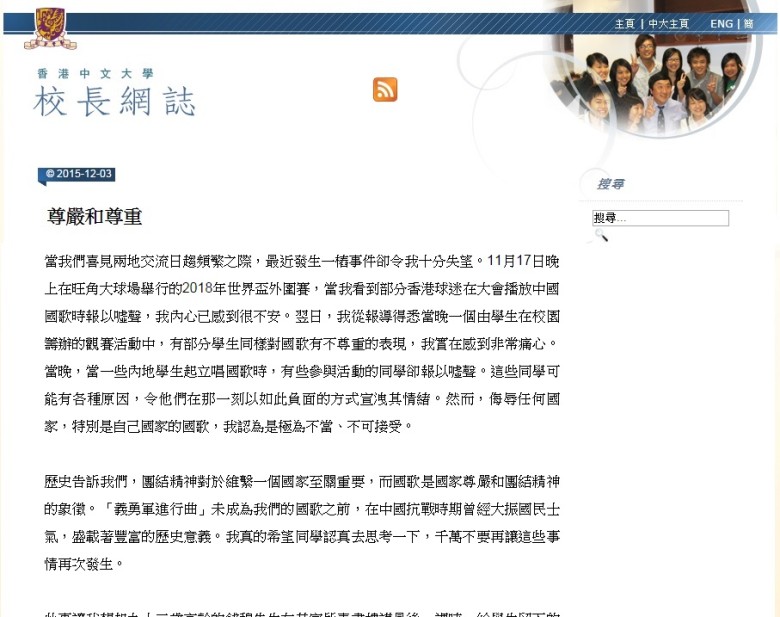
In a case of delayed reaction, Chinese University of Hong Kong vice-chancellor Joseph Sung Jao-yiu
has finally made a public statement.
Recently an incident has made me very
disappointed. On the night of November 17 at the 2018 FIFA World Cup
qualifying match at Mong Kok Stadum, I saw some fans boo'ed the Chinese
national anthem. The next day, I read a news report that a student-organized
match-watching event on campus also saw some students being disrespectful
towards the national anthem. I was really heartbroken. When some mainland
students stood up to sing the national anthem, some other students boo'ed
them. Those students can have any number of reasons to let out their
emotions in a negative fashion. But I think that it is inappropriate and
unacceptable for them to insult any country, especially their own.
History tells us that the spirit of unity
is of utmost importance to a country. The national anthem is the symbol of
national dignity and unity. Before <The March of the Volunteers> became our
national anthem, it was sung during the War of Resistance Against Japan to
lift up the people's morale. It carries great historical significance. I
sincerely hope that the students should seriously reconsider and not let
this happen again.
Finally Sung quoted Ch'ien Mu's last words
to the students: "你是中國人,不要忘記了中國! You are Chinese. Do not forget China!"
(EJ
Insight) December 4, 2015.
Joseph Sung, the vice chancellor of Chinese
University of Hong Kong (CUHK), has never been shy about wading into
politically charged issues and offering his comments on topics he deems
important.
In
keeping with his reputation, the university chief has now jumped into
the debate over the recent controversy surrounding Hong Kong football
fans and their booing of the Chinese national anthem.
In
a blog post titled ôDignity and Respectö, Sung wrote that it saddened
his heart to see that Hong Kong people had booed the national anthem
during the World Cup qualifier soccer match with China last month.
He
also wrote that he was ôdeeply disturbedö to learn that some CUHK
students had acted disrespectfully to the anthem as they watched the
Nov. 17 match on television at the campus.
In
the group-watching event, some mainland students stood up as the
national anthem was being played, but another set of students at the
gathering were said to have booed loudly.
ôIt is absolutely improper and
unacceptable to insult the National Anthem of our own as well as those
of others,ö Sung wrote in the post that was uploaded Thursday.
Towards the end of the article, Sung
invoked ChÆien Mu (commonly referred to as Master ChÆien), the renowned
philosopher and educator who had been a co-founder of Hong KongÆs New
Asia College, to remind students that they are all Chinese.
New Asia College is one of the founding
member institutions of CUHK.
In ChÆienÆs final lecture delivered at
his Sushulou residence in Taiwan, he is said to have told his students:
ôYou are Chinese. DonÆt forget China!ö
ChÆien, an anti-Communism historian and Confucian, relocated to Taiwan
in 1967 after arriving in Hong Kong in 1949 following the establishment
of the PeopleÆs Republic in the mainland.
CUHK is
closely associated with traditional Chinese culture, given the links
with New Asia College and its background.
By invoking remarks made by ChÆien many
years ago, Sung was apparently trying to instill awareness among locals
about the history and culture they share with China.
But what he didnÆt mention was the fact that the Communists, after
assuming power following a civil war, took a hostile approach to
traditional Chinese culture, especially the Confucianism that ChÆien
admired.
ChÆien and some other well-known
scholars escaped the Communist Party rule and came to Hong Kong, where
they established New Asia College in Mongkok.
In October 1967, the scholar
moved to Taiwan after accepting an invitation from the islandÆs then
President Chiang Kai-shek, and lived there until
he passed away in 1990 at the age of 95.
ItÆs fair to say that ChÆien never
recognized the legitimacy of the Communist Party regime in Mainland
China.
Otherwise, he wouldnÆt have left the country for Hong Kong, and later
Taiwan, which he regarded as the places that could truly preserve
traditional Chinese culture.
Given this piece of history, Sung was off
the mark in using ChÆienÆs name to urge Hongkongers to be more
respectful toward the motherland.
While Sung argued that the ôMarch of
the Volunteersö is a song of solidarity against invaders, its meaning
has completely changed after it was adopted as the national anthem. That
is because the regime of the Communist Party was founded on the fight
against fellow Chinese in a civil war, and not invaders.
What ChÆien referred to be ôChineseö
can be taken as the Chinese people living under the Republic of China
government, not those under the rule of PeopleÆs Republic.
From the perspective of many
traditional Chinese intellectuals, the PeopleÆs Republic regime marked a
downfall of traditional Chinese culture.
The national anthem, meanwhile, brings
uncomfortable memories to some people who fled to Hong Kong after the
Communist takeover of China.
Moving to the present context, there is
also anger in Hong Kong as Beijing appears to be going back on its
commitment to the ôone country, two systemsö and forcing the former
British colony to embrace the Communist rule.
Amid this situation, it shouldnÆt be
surprising that some people chose to boo the national anthem as a way to
express their anger and depth of feelings about the political situation.
While Sung is right in calling for
respect for the national anthem, he should have taken care not to appear
one-sided and lining up behind Beijing.
The university chief, who has won high
praise in the past for various actions and the role he played in helping
the city fight the SARS crisis in 2003, is expected to be impartial on
sensitive issues related to China and Hong Kong.
But now it appears that he is focusing
more on being politically correct as he serves a second term as CUHK
vice chancellor after winning a contract extension last year.
Given his outburst over the issue of
the national anthem, questions will be raised whether Sung has put his
own interests above that of studentsÆ freedom of expression.
Such actions could erode the good
reputation he earned over the years and make people see him as a member
of the pro-Beijing camp.
That is something that Sung himself
would surely not want.
- The so-called Battle between Hong Kong
and China is one of the worst games that I have seen in recent years. All I
saw was a group of people struggling with each other, completely without any
skill or tactic.
The Chinese national team has always been
disappointing because they only know to play one way; the Hong Kong team is like
what they were in the past, with occasional flashes of brilliance. If I
weren't a Chinese living in Hong Kong, I would have switched tv channels
early on.
While watching the match, it occurred to me
that the Hong Kong players are in the situation as Hong Kong itself. For the
Hong Kong players, the market is performing poorly, their income is pitiful
and the prospects are dim. That's how it's been for twenty years already.
Meanwhile the Chinese national team lacks both skill and character, but
their average income is more than ten times higher than the Hong Kong
players. Why?
Because they are in the Chinese market
where the tail wind is so strong that even pigs can fly! Over the past five
years, there is a huge infusion of capital led by Evergrande into the
Chinese Premier League, thus creating a strange situation: the Chinese
Premier League has attracted talents from over the world even as the Chinese
national team is making zero progress. The situation is similar in England.
When I was a sports reporter, the Hong Kong teams were asked it they were
interested in joining the Chinese Division A. The teams rejected the offer,
with the official explanation being that the level of play was poor. But
other veteran reporters said: "They don't want to spend the money! If they
are in Division A, they probably can't afford to pay airfares for the
teams!"
Twenty years have passed. The Chinese
Premier League is no longer its former shadow. In the next five years, the
broadcast rights for the Chinese Premier League will be 8 billion yuan,
which is more than the total of the Chinese broadcast rights of the English Premier
League, the Spanish Liga and the NBA added together. Meanwhile, Hong Kong soccer
is ailing with matches attended by only several dozen spectators. The best hope for Hong Kong players is to be signed by the
Chinese Premier League, or even organizing a Hong Kong team for the Chinese
Premier League. Even if they only manage to join the Chinese Division A,
their income and skills will improve immensely. If the Hong Kong players are
enjoying their fans chanting "We are Hong Kong," then this is seriously
delusional. Their future hope is with China.
- (Headline
Daily, November 22 2015) On Tuesday, more than 6,000 people crowded
into Mong Kok Sports Ground to watch Hong Kong versus China. On Saturday,
the two local club matches were attended by 334 and 728 spectators
respectively. This is the true level of support for Hong Kong soccer.
- Internet celebrity Szeto Gap-tai (January
6, 2014): If it weren't for the news story on match-fixing, I won't even
remember that there is still professional football in Hong Kong.
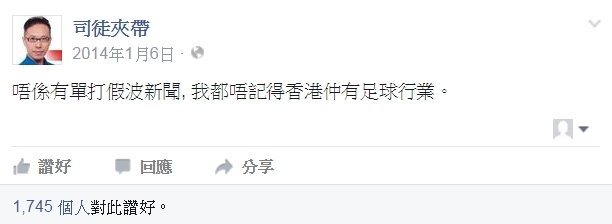
- (Oriental
Daily) The fact that Hong Kong was able to tie China twice is going
to cause the Hong Kong Football Association some problems. When the transfer
market opens up again in January, a number of Hong Kong team members will be
going north to dig gold. These include Lee Chi-ho (who played for Beijing
Guo'an two years ago and flunked out) and the "twin black towers" Festus Baise and
Jean-Jacques Kilama. During the friendly match between Hong Kong and
Myanmar, Chinese scouts were present to watch Sandro, Alex Akande and
Paulinho.
When Hong Kong tied China in Shenzhen on
September 3, a number of Chinese clubs were sending signals to Kilama,
offering much more than the $60,000 per month that he gets from Eastern
Club in Hong Kong. However, Kilama is still under contract here.
Right now it is almost certain that the
"black twin towers" of Baise and Kilama will be heading north next year. The
Eastern Club CEO Leung Sau-chi said: "They played for Hong Kong and their
excellent performances drew the attention of the mainland clubs. I am
personally happy for them. But their departures will impact our club. The
transfer fees will allow us to hire quality foreign replacements. However,
those two do not count as foreign imports because they have right of abode
after being here for seven years and there are no local players of the same
caliber. This is not something that can be solved with money alone."
Meanwhile Lee Chi-ho who had no takers
early this year has now found a golden opportunity. In the two matches
against China, Lee played as well as any of the Chinese players. He said to
our reporter:
"How did you get wind so quickly? Yes! I am going north in January! I cannot
tell you to which team yet. I will continue to play for Rangers here. After
all, Rangers gave me a chance early in the season." He added: "The terms are
very good. It is a lot higher than when I played for Beijing Guo'an. Hehe!"
- Why do Hong Kong players want to go
north?
Reason #1: Their monthly salary will get an extra zero behind.
Reason #2: The club game attendance figure will get one or two extra zeroes
behind. No professional soccer player wants to play in front of 50
spectators.
Reason #3: It is more challenging personally and collectively.
- Hong Kong goalie Yapp Hung-fai holding up
a sign:
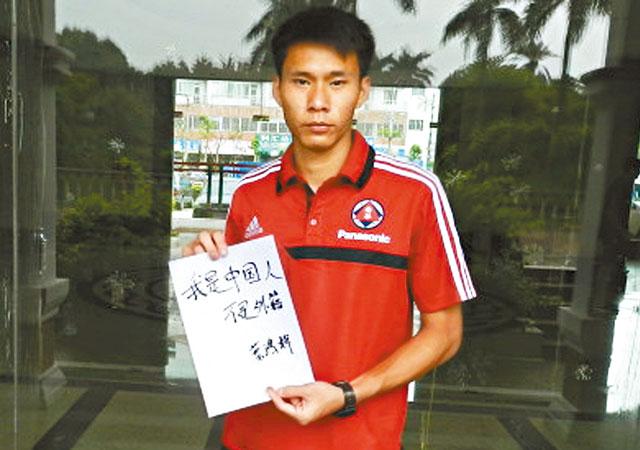
I am Chinese, not foreign nationality. Yapp Hung-fai
[This photo was taken when Yapp was hoping to be signed by the Guizhou
Renhuo team. The Chinese Football Association ruled that Hongkoners are to
be considered foreign imports. Thus, Yapp held up this sign to protest the
deprivation of a Chinese citizen from making a few bucks. Later, Yapp was to
say before a match against China that his top priority was to make sure that
China does not advance.]
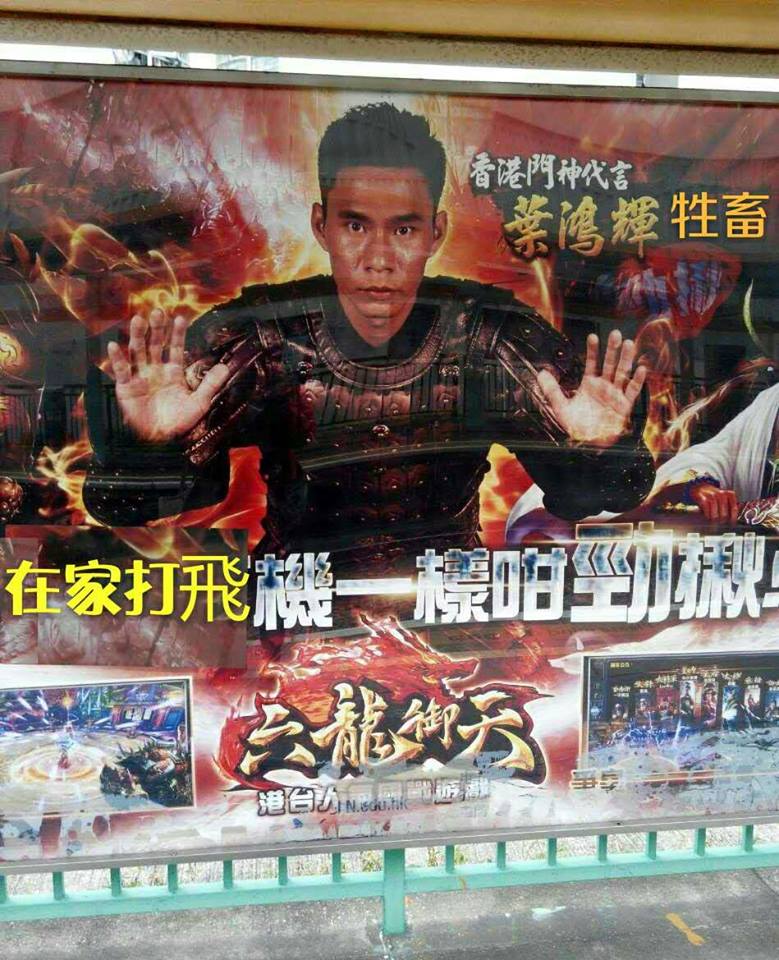
Yapp Hung-fai is a spokesperson for an online
game popular in Hong Kong/Taiwan
(SCMP
September 4, 2015) Hong Kong hero Yapp Hung-fai claimed he was
called a ôdogö by China captain Zheng Zhi during a thrilling 0-0 draw in
their World Cup qualifier in Shenzhen on Thursday night. Goalkeeper Yapp
posted a photo on Instagram around midnight with a short paragraph: ôWe made
it! Also, we, Hong Kong team intended to defend. You are mad at not winning
the match and approached me to call me a dog. Asian Footballer of the Year,
you have good skills, but you fail in terms of sportsmanship!ö Chinese media
confirmed with Yapp that the Asian Footballer of the Year mentioned was
Zheng. Zheng denied the allegation, telling mainland news portal sina.com:
ôI cursed him [Yapp]? It didnÆt happen. I did spoke to him. I said: ôGet up.
Nobody touched you!öö Zheng accused the Hong Kong team of time wasting and
Yapp of pretending to be injured. He said YappÆs accusation was a joke.
So will Yapp Hung-fai get a mainland club
offer that he can't refuse?
- (NOW
TV) December 15, 2015. The Chinese Football Association has
announced that any Hong Kong/Macau/Taiwan players signed before January 1,
2016 are considered Chinese players whereas any of those signed after that
date will be considered foreign imports. That means Kilama and Lee Chi-ho
will be considered Chinese players with Tianjin Songjiang and Meizhou Wuhua
because they have already signed. After January 1, 2016, Hong Kong players
will have to compete against the Brazilians, Colombians, Nigerians, etc.
(SCMP)
December 16, 2015.
Hong Kong players have reacted with
dismay after the Chinese Football Association declared that from now on
they would count as 'foreign' players in China's leagues. On Monday, the
Chinese Football Association announced players from Hong Kong, Taiwan and
Macau would no longer be registered as ôhome playersö, starting from
January 1. They would instead take up one of the three foreign-player
slots clubs are allowed in the China League - and that makes it far less
likely for Hong Kong players to earn lucrative transfers across the
border.
"They've killed the opportunity," said
South China's Brazilian-born forward Manoel dos Santos Filho. ôThe
decision is very hard and I donÆt know why they changed the rules,ö said
the player, known as Itaparica and who obtained his Hong Kong passport in
November. ôMany players are chasing the money that can be made playing in
China, which offers big opportunities and the chance to secure your
financial future. Before these new rules, you could just play there with a
Hong Kong passport, but now itÆs all over. The decision has actually
killed many playersÆ opportunity to play in China.ö
However, the CFA did include a grace
period, saying if the players and their clubs could reach an agreement
before January 1 and register with the CFA, they could retain 'home'
player status in the new season.
Affluent clubs across the border offer
much larger salaries than are available in Hong Kong. Many naturalised
Hong Kong players in particular have taken advantage; they were attractive
to clubs as it allowed them to sign a talented Brazilian or African who
didn't take up a foreign player slot. Jean Kilama, formerly of Eastern, is
said to be earning a monthly salary over HK$240,000 with Tianjin Quanjian
next season.
But Itaparica, who started his first
practise session with the Hong Kong team yesterday in preparation for the
annual Interport Cup against Guangdong later this month, said life had to
continue despite the new rules. The 35-year-old forward was selected in
the relatively young team after failing to get into the World Cup
qualifying squad for Hong Kong in their two matches against Maldives and
China in November.
ôI think I can still play soccer at the
highest level or I would have quit,ö said Itaparica, who scored the only
goal as he led Hong Kong against his club South China in the training
game. ôThe coming two Interport Cup matches will be very important as it
will prove I can help Hong Kong. Many people say I am too old and do not
score goals like before, but they forget I spent most of the last two
seasons in midfield and not in my usual position as a second striker. I
will prove to the coach I can still contribute to the team and play for
Hong Kong in the last World Cup qualifying match against Qatar in March.ö
- Post on City University's Democracy Wall:
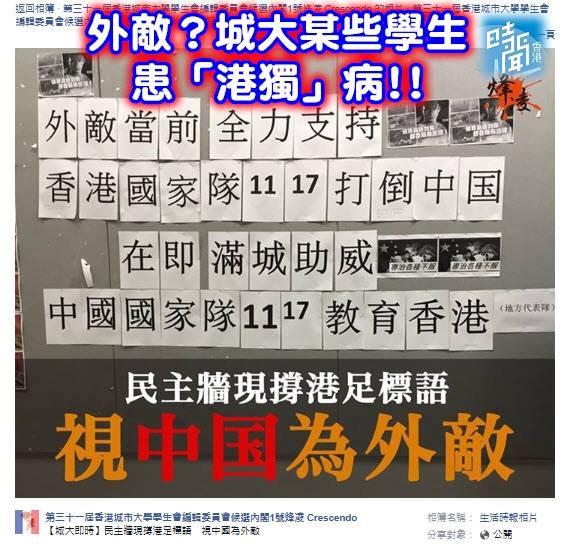
With foreign enemies arriving here, we will give full support
Hong Kong's national team will defeat China on November 17
Immediately the whole city will offer backup support
Chinese national team will teach Hong Kong on November 17
- At around 7pm on November 19, a female
mainland student was spotted ripping down the HONG KONG IS NOT CHINA post on
the Democracy Wall inside City University. She attempted to replace it with
replacing NOT CHINA with JUST A PART OF CHINA. As seen in the video, she had
already posted JUST A. A male Hong Kong student argued with her. She also
covered her face and cried. She asked the reporter not to film her and tried
to cover the camera eye. Our reporter told her to stop. The Hong Kong
student said that he observed the whole process. When she spotted him
filming, she tried to seize the camera in order to delete the film. He told
her that she better restore the poster or else he would post the video onto
the Internet. The Hong Kong student said that his hand was injured in the
struggle. As he tried to show our reporter his wounds, the mainland student
cried: "I really didn't intend to hurt you. Do you feel that I intentionally
injured you?"
https://www.facebook.com/cityucrescendo2015/videos/390412157816349/
https://www.facebook.com/bbtauseeworld/videos/427772280753488/
- Two can play:
https://www.facebook.com/I.AM.proudtobe.CHINESE/posts/898455453565245
Three putonghua speaking men posted "HONG KONG BELONGS TO CHINA" on the
Democracy Wall at City University. The person who made the post followed the
rules and wrote down his student ID number. So let us see if this post will
be allowed to stay the allotted amount of time as every other post. Or will
someone sneak up and rip it out while no one is watching?
- Boos? There were plenty of boos when
Turkey played Greece in Istanbul and a minute of silence was held for the
Paris massacres. The crowd was chanting "Allahu Akbar" (God is Great).
https://www.youtube.com/watch?v=ZwKOq2oz9Nk
- Sorry, they were chanting "Sehitler
olmez, vatan bolunmez" which means "Martyrs never die, the nation won't
be divided." This is a common slogan thrown in remembrance of Turkish
soldiers who fell victim to terrorism. In Turkey, there is rarely a minute
of silence that isn't interrupted by this chant. Whether its a minute of
silence for a Turkish catastrophe, or something else that happened globally,
this always happens. The booing wasn't for the victims in Paris, but more to
do with the hypocrisy of the Western world. International teams did not hold
a minute's silence after the Ankara terror attack in October. More than 100
people died in the Turkish capital after two bombs were set off outside the
Ankara Central railway station on 11 October.
https://www.youtube.com/watch?v=lMGPsvWz2j8
- (Bastille
Post with video) November 22, 2015. In the AFC Champions League,
Evergrande (Guangzhou, China) defeated Al Ahli (United Arab Emirates) 1:0 in
Guangzhou to win the title. Evergrande's principal is Ma Yun (Alibaba).
Afterwards, the Evergrande fans began to sing songs including the Queen's
"We Are The Champions" and Beyond's "Vast Oceans, Boundless Skies". Chinese
national team captain Zheng Zhi may be pilloried in Hong Kong but he is a
hero here. It is wistful that the only difference between Evergrande and the
Chinese national team is several foreign imported stars. However, Evergrande
is bent on nurturing the next generation of the Chinese national team. After
this match, 2800 of the Evergrande Soccer School students came onto the
field. When these students mature, the Evergrande team will be completely
Chinese.
- The match was won with the goal by Brazilian Elkeson. Evergrande is
coached by former Brazil national coach Luis Scolari.
- By the way, the team bonus for the win was $20 million RMB compared to $1
million had Hong Kong defeated China.
- (SCMP)
March 25, 2016. Hong KongÆs World Cup qualification hopes ended on Thursday
night as group leaders Qatar exposed a gulf in class, beating their visitors
2-0. With China scoring an expected 4-0 win over Maldives in Wuhan in an
earlier match, Hong Kong had to settle for a third place in group C after a
10-month campaign in the regional qualification tournament. Only the top two
teams of the group advance to the next round that features AsiaÆs best 12
teams. Both Hong Kong and China have now collected 14 points but the
mainlanders prevailed with a superior goal difference. They will host Qatar
in Xian next week looking for a win that could can see them become one of
the four best second-placed teams across the eight qualification groups.
Coach Kim Pan-gon, who had seven
naturalised players in the starting line-up, including two newcomers Andy
Russell and Roberto Affonson Jnr, had no complaint about this result nor the
entire tournament. ôWe had a good start to the qualification tournament with
naturalised players joining the team from time to time,ö said the coach.
ôToday the players did their best to try to qualify for the next stage but
we failed. We have to accept the result but more importantly we need to
analyse all our performances as we prepare for the future.ö
Captain Yapp Hung-fai
accepted Qatar were clearly the better side. ôWe have learned there is a big
gap against strong teams and this is important as we are looking for
improvement,ö said the goalkeeper. ôOverall, we cannot be too disappointed
although it is not a good result.ö
- (FIFA)
Team Hong Kong roster plus places of birth:
Yapp HF: born in Hong
Kong
Lee Chi Ho: born in Hong Kong
Festus Baise: born in Nigeria
Andy Nõgelein: born in Hong Kong, father is German
Huang Yang: born in Shanghai, China
Jack Sealy: born in London, England
Affonso Junior: born in SÒo Paulo, Brazil
Paulinho: born in Piracicaba, SÒo Paulo, Brazil
Sandro: born in Brazil
Jaimes Mckee: born in Birmingham, England
Andy Russell: born in Southampton, England
Alex Akande: born in Lagos, Nigeria
Godfred Karikari: born in Kumasi, Ghana
This means that only
two players fit the Localists' definition of Hongkonger. We want Hong Kong
Priority!
- (SCMP)
March 30, 2016. China breathed new life into their World Cup soccer dream
when they stunned Qatar 2-0 on Tuesday night to move to the brink of the
next round of qualifying. Second-half goals from Huang Bowen and Wu Lei
shocked Qatar, who had won all seven of their previous group C games, on a
dramatic night in Xian. ChinaÆs win, together with the PhilippinesÆ surprise
3-2 victory over North Korea in Manila, put Team Dragon in the box seat to
clinch a spot in the third qualifying round.
- Because the Chinese are an inferior race,
they could not have advanced to the next round without chicanery involved.
Here is what they did:
They needed Hong Kong to lose to Qatar
first. That was easy, because the Hong Kong players are salivating at the
big fat contracts that await them in the Chinese Premier League. A Hong Kong
player who scores the goal that ousts China will not be getting any offers.
Next China has to beat Qatar. Oil prices
are plummeting worldwide. Petroleum and liquefied natural gas are the
cornerstones of Qatra. So they couldn't afford to offend their biggest
customer. Besides the match doesn't mean anything to Qatar which had
qualified a while ago.
Next Jordan has to lose to Australia. China
is a permanent member of the United Nations Security Council and Jordan
needs China's help in stopping any spillover from wars in Iraq and Syria. It
is easy to lose 5-1 against a strong team like Australia.
Next North Korea has to lose to the
Philippines. China is the big brother who props up the North Korean economy,
so how is the little brother going to object? It was not easy for North
Korea to find a way to lose to lowly Philippines but they did it through
hard work. It does not really matter to North Korea because they were
leading their group and they will advance to the next round as one of the
top four second-place teams.
- (Hong
Kong Free Press) The national anthem dilemma: Contextualising the
political dissent of football fans in Hong Kong. By Tobias Zuser. November
21, 2017.
Over the last few months, international
media have taken an unusual interest in both friendly and qualifying games
of Hong KongÆs football team, though, the attention was limited to just
those few minutes prior to kick-off. Once the ôMarch of the Volunteersö,
ChinaÆs national anthem, sounded through the stadium, roughly one third of
the spectators would join into a cacophony of booing and jeering, recorded
by the surrounding crowd of accredited journalists.
What started as a cynical voicing of
dissent in the aftermath of the Umbrella Movement û for the first time
collectively practiced during the World Cup qualifying games in June of
2015, has since then become a fixed ritual at every single home game, with
no indication of losing its momentum any time soon. Neither warnings by
FIFA or the AFC, nor the subsequent monetary fines could put an end to
this practice, eventually triggering a political reaction from Beijing.
On November 4th, 2017, the National
PeopleÆs Congress Standing Committee amended the annex of Hong KongÆs
Basic Law by formulating a clause that requires the solemn observation of
both national flag and anthem. Before this new legislation can be
enforced, the local parliament still needs to pass a separate bill, a
process that is expected to take at least several months. Meanwhile, the
booing of the anthem continues, with growing anticipation for a legal
showdown once the law is in place.
Distorting a national anthem is widely
regarded as an offensive breach in sporting etiquette, but the case of
Hong Kong suggests another dimension of a cultural-legal complexity.
Despite not being an actual nation-state, Hong Kong obtained both FIFA and
IOC membership during its colonial period, facilitating the occasional
paradox of a nation that would have to play against itself. When China and
Hong Kong faced each other during the World Cup qualifiers in 2015, only
one anthem had to be played before kick-off, while the opposing fan groups
were both dressed in red and could hardly be distinguished on the TV
screen.
Arguably, the anthemÆs role for
self-identification has also remained rather limited, with the vast
majority of Hong Kong citizens refraining from singing the lyrics
altogether, no matter what the occasion. When the Mandarin ôMarch of the
Volunteersö replaced the English ôGod Save the Queenö in 1997, it
certainly offered a powerful symbol for the transfer of sovereignty, but
it also gained little relevance in a predominantly Cantonese-speaking Hong
Kong.
Nonetheless, the act of booing your own
anthem remains a rare case within the current sporting landscape, and
renders the disciplinary paternalism of governing bodies a bit more
controversial than usual. Interestingly, this ritual can only be observed
at football games, although there are be plenty of other occasions every
year at which the Chinese national anthem appears. The traditionally
sold-out exhibition games of the Chinese national womenÆs volleyball team
that attract a bigger crowd than the average football match, are usually
observed by an audience that offers passionate support throughout the day,
and will only enter into a state of silence for the duration of the
anthem.
Of course, the football stadium is often
categorised as a ôthird spaceö in which it is easier (and often even more
effective) to perform political dissent, but these conclusions often
happen without acknowledging the role of fan culture. In the case of Hong
Kong, local football has largely disappeared from mainstream media
discourses, which also remained ignorant towards the revival of local
fandom in recent years.
The professionalisation of domestic
football clubs has attracted a new generation of supporters to the local
game, who increasingly seek inspiration from other fan groups abroad,
including Japan, Malaysia, and China. The last few years have also seen
the introduction of new chants both in the league and at international
games, and there has been an increasing effort to adopt more Cantonese
songs instead of generic English banter.
This indigenisation process also
increasingly involved the subcultural formation of ôtrollingö, which has
been thriving on popular online platforms such as HK Golden or LIHKG, and
eventually made its way into football stadiums by materialising online
memes as stuffed toys and replicating cursing slangs next to the pitch.
Nonetheless, although most of these organised groups do have clear
political tendencies, they generally refrain from public calls for dissent
or protest.
This means that the booing of the anthem
should not be seen as a political movement encroaching the domain of
sport, as it is often portrayed in media. Instead, it has been embedded in
practices of an emerging fan culture in which dissenting voices make up a
significant proportion. With the absence of coordinated action, it is
difficult to predict its persistence, and meanwhile, there has been
growing concern among fans how the booing might adversely affect the
development of local football, as shown by the growing tension between
football fans and journalists during match days.
Many might still think that Hong Kong
football has been trapped in its own insignificance, but forcing a change
in the cityÆs constitution could as well be understood as a sign of its
lingering importance. The shared passion for the ôbeautiful gameö, both in
Hong Kong and the Chinese mainland, might for the time-being be more
unifying than the national anthem itself.
(Oriental
Daily) November 17, 2015.
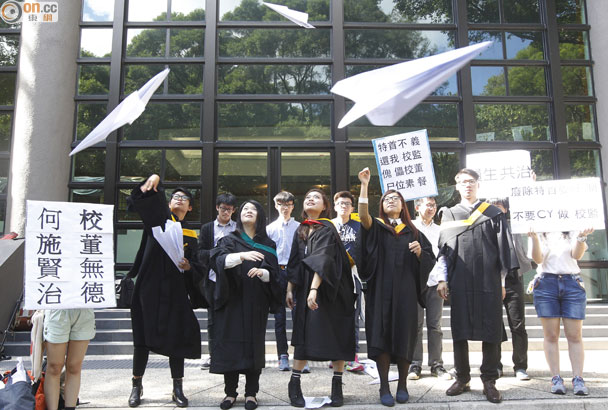
Today Lingnan University held graduation
ceremony. About 10 new graduates demonstrated outside the venue by raising
placards and chanting slogans. Before the ceremony, Lingnan University
Alumni Concern Group spokesperson Lee Mei-ting said that they intend
to protest during the ceremony. Then about 30 new graduates threw paper
airplanes inside the venue and place white roses on the stage in front of
vice-chancellor Leonard Cheng to symbolize their desire for freedom. They
also want the right to elect the board of trustees, and to have no threats
against teachers and students for expressing their opinions. The white roses
were intended to mourn Lingnan University. After the ceremony, about a dozen
new graduates tossed airplanes outside the venue.
According to Lee Mei-ting, 200 paper airplanes
were prepared. They chose to protest at the graduation ceremony because this
is their last chance to express their opinions as students. She said that
their method of protest was solemn and ironical, and did not disturb the
atmosphere of the ceremony. She said that she was dissatisfied with Leonard
Cheng sending a letter to Wan Chin
to tell him to be "careful about what he said." She said that Cheng was
intimidated a teacher, and interfering with freedom of expression and
academic research. Lee said that the university was suppressing freedom of
press by not permitting filming during the ceremony.
Today, various newspapers in Hong Kong carried
an advertisement in which several hundred persons signed to protest against
the newly appointed trustees. They said that political interference is
taking place. The Lingnan University Alumni Concern Group demanded that the
government withdraw the appointments and eliminate the law which makes the
Chief Executive chancellor with the power to appoint trustees. They also
demanded that the Lingnan University Ordinance be amended so as to have more
students and staff on the board of trustees for self-rule.
(SCMP)
January 12, 2016.
In November of last year, Lingnan
UniversityÆs class of 2015 celebrated their graduation amid funereal white
flowers. Angry placards were raised in the audience. Paper aeroplanes
littered the stage, all bearing the slogan æI want real qualificationsÆ. The
students were protesting, and their anger pierced through the
otherwise congratulatory spirit of the occasion. The target of the protest
was the University Council, and the appointment of pro-Beijing figures to it
by Chief Executive Leung Chun-ying.
For the past two years, protests have been a
common feature at many university graduation ceremonies across Hong Kong.
Protesting at graduation is seen as an opportunity to embarrass CY Leung,
who ù following the colonial tradition of installing political heads of
state as university figureheads ù is Chancellor of all public universities
in the city. Li Mei-ting, convener of the Lingnan Alumni Concern Group, was
among those protesting. ôThe paper planes are for CY Leung,ö Li said. ôHe is
the Chancellor, his name is printed on our certificates, yet he does not
turn up at any of our commencements.ö In response, the council are set
to discuss the setting up of a task force to review council membership
at its meeting on Tuesday, January 12th.
The University Council is the highest
executive body of the school; it assigns departmental budgets and determines
the direction of the schoolÆs development. The Chief Executive has great
influence on the council: he can directly appoint 18 (of the 33) seats, and
members do not have to be from the University or even in education. Colonial
Governors acting as Chancellors rarely exercised such power, understanding
the role to be a chiefly honorary one. Since the 1997 Handover, however,
Chief Executives have been directly appointing more and more council
members. To date, only eight council members are from the University itself,
making up less than one-fourth of the council.
CY LeungÆs council member choices have not
done anything to appease studentsÆ concerns. One of the new members, Junius
Ho Kwan-yiu, caused outrage last May when he suggested to RTHK City
Forum that the government should stop funding the Lingnan University
Student Union. Ho wanted the Student Union dismissed for organising a campus
concert at which a cover of æFuck Tha PoliceÆ (a well-known hip-hop song
advocating resistance to police brutality) was performed. A month after his
council appointment in October, tensions flared again when Ho walked out of
a council consultation hosted by the Student Union. He accused the students
of insulting his wife.
ôI donÆt know if [HoÆs appointment] has any
implications,ö said Prof. Annie Chan Hau-nung, one of the three new council
members elected by the school. She acknowledged that CY Leung must have
known about the situation between Ho and the students: ôIt is obvious that
the Chief Executive is challenging the orientation of the Student Union. But
at the same time, Ho has a certain status à I think the Chief Executive has
other considerations as well.ö
Institutions of higher education across
Hong Kong share the same problem of council under-representation. The Chief
Executive can directly appoint 15 to 18 council members at the Hong Kong
Baptist University, the Open University of Hong Kong, the Hong Kong
Institute of Education and the Hong Kong Academic of Performing Arts. Up to
83% of their school council seats are appointed this way. In many other
universities around the world, external members generally make up less than
20% of their council seats.
ôWe need sufficient school members to take
part in the schoolÆs governance,ö Chan said. ôThey can explain the situation
of the school to external parties in the council whom are not working in the
education industry. There are not enough school members in the council right
now, causing an imbalanced view within.ö
If university staff are under-represented
on the council, students are all the more so: the council reserves a single
seat for the Student Union President. Discontent around the issue forced the
council to form a Review Panel in 2013, aimed at strengthening student
participation on the council and on university matters in general. The
Review Panel website has not been updated since November 2014. ôWe have held
some meetings,ö the Secretary to the Review Panel, Monica Tsang Tai Mo-oi,
said on the phone. ôWe had some recommendations and we are still in
discussion.ö Their last meeting was in April 2015.
Li found this lack of action hard to
accept. ôI lived on campus for two years and am studying a masterÆs degree
here, but I have never heard any news from the Review Panel,ö she said. ôI
think it is just a PR move.ö
Alumni have almost no role on the council.
The Lingnan Education Organization (LEO) can nominate seven members onto the
council, drawing from a pool of Lingnan primary and secondary schools,
community colleges, and the University itself. But because this requires
first joining the Lingnan University Alumni Association and then becoming a
member of LEO, opportunities to be elected this way are slim.
Making things worse, the Lingnan University
Council has also been plagued by charges of diploma falsification. Lifelong
College, a private school founded by council member Alex Li Ye-lick, is
being investigated by the Police ForceÆs Commercial Crime Bureau
on allegations that it is a diploma mill. Lingnan UniversityÆs Associate
Vice-President Herdip Singh resigned last November after being accused of
plagiarism in his doctoral dissertation; his degree was received at Lifelong
College.
In response to enquiries from the press,
Lingnan University has stated that council activities, including the
appointment of members by the Chief Executive, cannot be changed or
overruled by the University.
ôRegardless of the truth of the
allegations, us students and alumni have no power to interfere,ö said Li Mei-ting.
ôOur absence on the school board is a more serious problem than the
allegations themselves.ö
On the eve of the first Lingnan University
Council meeting with all its new members, Prof. Chan is pessimistic about
how much her membership will allow her to accomplish. ôThere is very little
I can do; we are just the minority in the councilö, she said. ôBut at least
I can try to make some noise.ö
Chan has started a petition pushing for
greater student and alumni participation in council operations, which has
garnered over 100 signatures from Lingnan academic staff. She is also a
member of the ScholarÆs Alliance of Academic Freedom, an organisation formed
amid the furore over Prof. Johannes ChanÆs blocked bid
for pro-vice-chancellorship at the University of Hong Kong. ôThis is an
uphill battle,ö Chan said. ôWe have to strive and defend what we believe is
important.ö
As for Li, she wants students to join hands
with teachers and alumni to fight for greater representation on the
University Council. In an attempt to catalyse discussion on the issue, she
and other alumni have plans to publish a book on the identity of Lingnan
students and culture. In the long run, however, her advice is to hunker
down: ôThis will be a long warö, she says.
(Hong
Kong Free Press) January 11, 2016.
In November of last year, Lingnan
UniversityÆs class of 2015 celebrated their graduation amid funereal white
flowers. Angry placards were raised in the audience. Paper aeroplanes
littered the stage, all bearing the slogan æI want real qualificationsÆ. The
students were protesting, and their anger pierced through the
otherwise congratulatory spirit of the occasion.
The target of the protest was the
University Council, and the appointment of pro-Beijing figures to it by
Chief Executive Leung Chun-ying.
For the past two years, protests have been a
common feature at many university graduation ceremonies across Hong Kong.
Protesting at graduation is seen as an opportunity to embarrass CY Leung,
who ù following the colonial tradition of installing political heads of
state as university figureheads ù is Chancellor of all public universities
in the city. Li Mei-ting, convener of the Lingnan Alumni Concern Group, was
among those protesting. ôThe paper planes are for CY Leung,ö Li said. ôHe is
the Chancellor, his name is printed on our certificates, yet he does not
turn up at any of our commencements.ö
In response, the council are set to discuss
the setting up of a task force to review council membership at its meeting
on Tuesday, January 12th.
The University Council is the highest
executive body of the school; it assigns departmental budgets and determines
the direction of the schoolÆs development. The Chief Executive has great
influence on the council: he can directly appoint 18 (of the 33) seats, and
members do not have to be from the University or even in education. Colonial
Governors acting as Chancellors rarely exercised such power, understanding
the role to be a chiefly honorary one. Since the 1997 Handover, however,
Chief Executives have been directly appointing more and more council
members. To date, only eight council members are from the University itself,
making up less than one-fourth of the council.
CY LeungÆs council member choices have not
done anything to appease studentsÆ concerns. One of the new members, Junius
Ho Kwan-yiu, caused outrage last May when he suggested to RTHK City
Forum that the government should stop funding the Lingnan University
Student Union. Ho wanted the Student Union dismissed for organising a campus
concert at which a cover of æFuck Tha PoliceÆ (a well-known hip-hop song
advocating resistance to police brutality) was performed. A month after his
council appointment in October, tensions flared again when Ho walked out of
a council consultation hosted by the Student Union. He accused the students
of insulting his wife.
ôI donÆt know if [HoÆs appointment] has any
implications,ö said Prof. Annie Chan Hau-nung, one of the three new council
members elected by the school. She acknowledged that CY Leung must have
known about the situation between Ho and the students: ôIt is obvious that
the Chief Executive is challenging the orientation of the Student Union. But
at the same time, Ho has a certain status à I think the Chief Executive has
other considerations as well.ö
Institutions of higher education across
Hong Kong share the same problem of council under-representation. The Chief
Executive can directly appoint 15 to 18 council members at the Hong Kong
Baptist University, the Open University of Hong Kong, the Hong Kong
Institute of Education and the Hong Kong Academic of Performing Arts. Up to
83% of their school council seats are appointed this way. In many other
universities around the world, external members generally make up less than
20% of their council seats.
ôWe need sufficient school members to take
part in the schoolÆs governance,ö Chan said. ôThey can explain the situation
of the school to external parties in the council whom are not working in the
education industry. There are not enough school members in the council right
now, causing an imbalanced view within.ö
If university staff are under-represented
on the council, students are all the more so: the council reserves a single
seat for the Student Union President. Discontent around the issue forced the
council to form a Review Panel in 2013, aimed at strengthening student
participation on the council and on university matters in general. The
Review Panel website has not been updated since November 2014. ôWe have held
some meetings,ö the Secretary to the Review Panel, Monica Tsang Tai Mo-oi,
said on the phone. ôWe had some recommendations and we are still in
discussion.ö Their last meeting was in April 2015.
Li found this lack of action hard to
accept. ôI lived on campus for two years and am studying a masterÆs degree
here, but I have never heard any news from the Review Panel,ö she said. ôI
think it is just a PR move.ö
Alumni have almost no role on the council.
The Lingnan Education Organization (LEO) can nominate seven members onto the
council, drawing from a pool of Lingnan primary and secondary schools,
community colleges, and the University itself. But because this requires
first joining the Lingnan University Alumni Association and then becoming a
member of LEO, opportunities to be elected this way are slim.
Making things worse, the Lingnan University
Council has also been plagued by charges of diploma falsification. Lifelong
College, a private school founded by council member Alex Li Ye-lick, is
being investigated by the Police ForceÆs Commercial Crime Bureau
on allegations that it is a diploma mill. Lingnan UniversityÆs Associate
Vice-President Herdip Singh resigned last November after being accused of
plagiarism in his doctoral dissertation; his degree was received at Lifelong
College.
In response to enquiries from the press,
Lingnan University has stated that council activities, including the
appointment of members by the Chief Executive, cannot be changed or
overruled by the University.
ôRegardless of the truth of the
allegations, us students and alumni have no power to interfere,ö said Li Mei-ting.
ôOur absence on the school board is a more serious problem than the
allegations themselves.ö
On the eve of the first Lingnan University
Council meeting with all its new members, Prof. Chan is pessimistic about
how much her membership will allow her to accomplish. ôThere is very little
I can do; we are just the minority in the councilö, she said. ôBut at least
I can try to make some noise.ö
Chan has started a petition pushing for
greater student and alumni participation in council operations, which has
garnered over 100 signatures from Lingnan academic staff. She is also a
member of the ScholarÆs Alliance of Academic Freedom, an organisation formed
amid the furore over Prof. Johannes ChanÆs blocked bid
for pro-vice-chancellorship at the University of Hong Kong. ôThis is an
uphill battle,ö Chan said. ôWe have to strive and defend what we believe is
important.ö
As for Li, she wants students to join hands
with teachers and alumni to fight for greater representation on the
University Council. In an attempt to catalyse discussion on the issue, she
and other alumni have plans to publish a book on the identity of Lingnan
students and culture. In the long run, however, her advice is to hunker
down: ôThis will be a long warö, she says.
Video:
(Speakout HK)
https://www.youtube.com/watch?v=SkzX3Zpw_Ng
(Speakout HK)
https://www.youtube.com/watch?v=z7YhFPU7KAk
(Radio Free Asia)
https://www.youtube.com/watch?v=edqJu3d-AMM
(TVB)
http://news.tvb.com/local/564b056d6db28ccc62000004/ (0:47) A parent:
"I don't oppose them. I understand that they want to express their opinions.
But I think that they should respect the ceremony." Another parents: "I feel
that this meeting belong to the graduating students. Ultimately they took up
some time."
Internet comments:
- I hope that they bothered to
pick up the paper airplanes after they launched them into the air.
- Even if they picked up all the paper airplanes afterwards, did they make
sure that the paper was recycled?
- When these new graduates get a job with a
company, they are going to demonstrate against their supervisors and demand
one-person-one-vote with civil nomination to elect senior managers.
- Lee Mei-ting has just told me that if a corporate manager issues a letter
of warning for using obscene language at work, then he is violating my
freedom of expression.
-
There is normally only one student representative appointed for one year to
the board of trustees. During the course of that year, the student
representative can barely learn the ropes. Just ask: How much does a
second-year student know about running a university? About appraising the
qualifications of job candidates? By the time a student representative
learns enough, it is time for him/her to move on (e.g. overseas exchange,
graduation, etc). A board of trustees with a majority of student
representatives is not sustainable.
- There are normally several academic and non-academic staff members on the
board of trustees. A board of trustees with a majority of staff member is
not likely to work because it will tilt towards protecting existing
interests (e.g. give huge pay raises, oppose downsizing in spite of
dwindling enrolment, etc).
- The proper target is not the Chief Executive
or the board of trustees. On a day-to-day basis, it is the
president/vice-chancellor who is in charge. So why are the students not
demanding to elect their president/vice-chancellor? The answer is very
simple -- the staff and students are unqualified to screen the academic and
administrative records of the potential candidates. If they make a decision
it will something along the lines of "Leonard Cheng had supported CY Leung
in the past and this makes him unfit to become Lingnan University
president." As for
Leonard
Cheng's work on "applied game theory, market structure, currency
crisis, international trade and investment, technological innovation and
imitation, and ChinaÆs inward and outward foreign direct investment", how do
you expect a first-year student or a department administrative assistant to
make an informed evaluation and vote accordingly?
- If Lingnan University manages to elect its
president by universal suffrage, then it may be unique in the world. What is
for certain is that they will not get any high-quality applicants for the
job. What administrator/scholar would put themselves through this kind of
meat grinder? However highly you think of your own administrative skills and
academic accomplishments, it means nothing because the voters only want to
know what you think of CY Leung.
- This Lingnan University Alumni Concern Group
seems to be loaded with money because they can afford to buy newspaper ads.
- It always comes down to
$MONEY$. If Lingnan University faculty and students truly want to be
independent, they can reject the government subsidies offered through the
University
Grants Commission and become privatized. The students only have to
quadruple their tuition fees while the faculty can help by accepting a 50% pay
cut. You can't take the government's money and want no oversight in the name
of academic freedom.
- Did
the reporter ask Lee Mei-ting whether her breasts have been fondled by
mainland men and whether she washed her vagina before providing service?
- When a teacher talks that way to Lee Mei-ting, do you think the
vice-chancellor should give a warning to that teacher?
- Flying paper airplanes? Well, in Cantonese,
the term "打飛機"
(shooting at airplanes) means masturbation. This is exactly what this whole
exercise is -- you feel good about yourself, but you won't change anything
in the world.
- '嘈完一輪又得個吉.'
After all the hubbub, nada.
- What kind of journalism is this? Did anyone
interview the non-protestors? About how they felt about the demonstration at
their graduation ceremony?
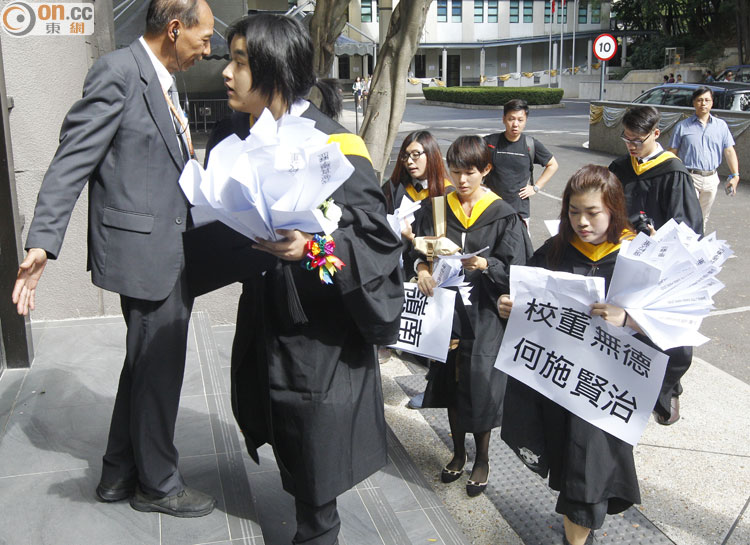
- The photo shows about 10 demonstrators. How many new graduates in total
were there? 100? 500? But this important moment of the lives of these others
was overshadowed by morons throwing paper airplanes around.
- Normally, the diploma has the signature of the chancellor (=Chief
Executive). Did the protestors rip their diplomas up?
- So when you have a graduation ceremony to celebrate, someone places white
flowers (=symbols of death) on the stage. Someday when Lee Mei-ting gets
married, you should show up with a funeral wreath to pay her back.
- (Speakout
HK) Lingnan University trustee Wong Kwun-yu said that it is
inappropriate to demonstrate during the graduation ceremony. He said that
the students have worked hard for four years to earn their degrees and this
is the day that they and their families were looking forward to. It would be
unfair to them if a small number of students want to demonstrate during the
ceremony. He said that the students should respect other people. If someone
insists on using this occasion to express political opinions, the students
will end up losing.
- (Ming
Pao) By tradition, the university chancellor (=Chief Executive)
should attend the graduate ceremonies of at least two universities per year.
This year, CY Leung will attend not any. In 2012, at the Academy of
Performing Arts, the students crossed their arms and made thumbs down
gestures to greet Leung; in 2013, Chief Secretary Carrie Lam took Leung's
place at the Academy of Performing Arts, and the students crossed their arms
and sang <Did you ask who hasn't spoken yet?>. Education sector legislator
Ip Kin-yuen said that the chancellor has the duty to attend important
ceremonies such as graduation. He thinks that Leung hasn't fulfilled his
duties.
- As if the students aren't
disruptive enough now, Ip Kin-yuen wants even more trouble. Right now, the
students can surely demonstrate anytime anywhere that they want, but they
chose to disrupt the graduate ceremony because they know they will get media
exposure. If the Chief Executive comes, the students will create an even
greater stir and outside radical groups will crash the gate and put on their
own show.
- This is
continuation of the Yellow Ribbon Occupy Central. They want civil
nomination of the Chief Executive, and they decide to put the citizens
through hell to get media exposure. In like manner, the 10 Lingnan
students want attention so they put the entire graduating class and their
families through hell to get media exposure.
(Oriental
Daily) November 15, 2015.
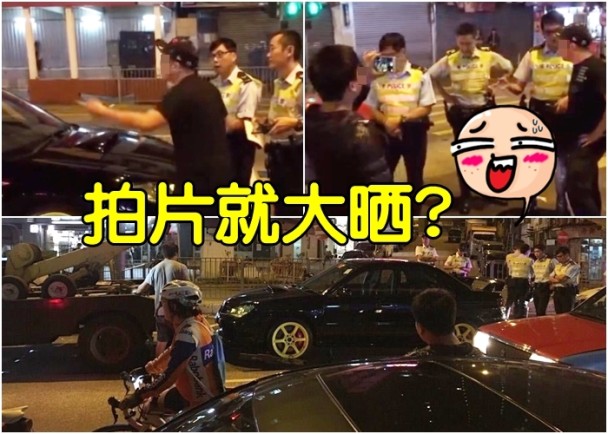
At the intersection of Ma Tau Wai Road and
Bailey Street in Hung Hom, a black sedan car was intercepted by the police
early in the morning. The driver came out and cursed out the police. The
police suspected that the car was illegally modified. The unhappy driver
launched a stream of obscene invectives.
While the police were writing a summons, the
driver continued to yell: "Are you done with the ticketing?" "Take the video
and note how long they took to record the information in an ID" and "He is
still not fucking writing the ticket. Take a video and post it onto the
Internet."
The video was
posted onto YouTube, and drew plenty of negative comments about the driver.
- That driver was guilty as
hell, and that's why he didn't want the police to check his car. He thought
that screaming aloud means that he is innocent.
- He raved and ranted for so long, but in
the end he got what he wished for -- the police towed away the car.
- This guy thinks that he is such a big
shot. His choice of words went too far already. The police mishandled the
case. When a man is screaming and yelling in the middle of the night, they
should have invited him back down to the police station for a chat instead
of letting him disturb the neighborhood.
- This is so pathetic. Hong Kong should
really consider criminalizing the act of insulting a police officer.
- This bloke posted the video on the
Internet, thinking that he looked really cool.
Very soon afterwards, the
Internet human flesh search engines flushed out information on the driver
named Leung. It turns out that he works for a car washing shop named Lok Go on
Wing Kwong Street, To Kwa Wan district.
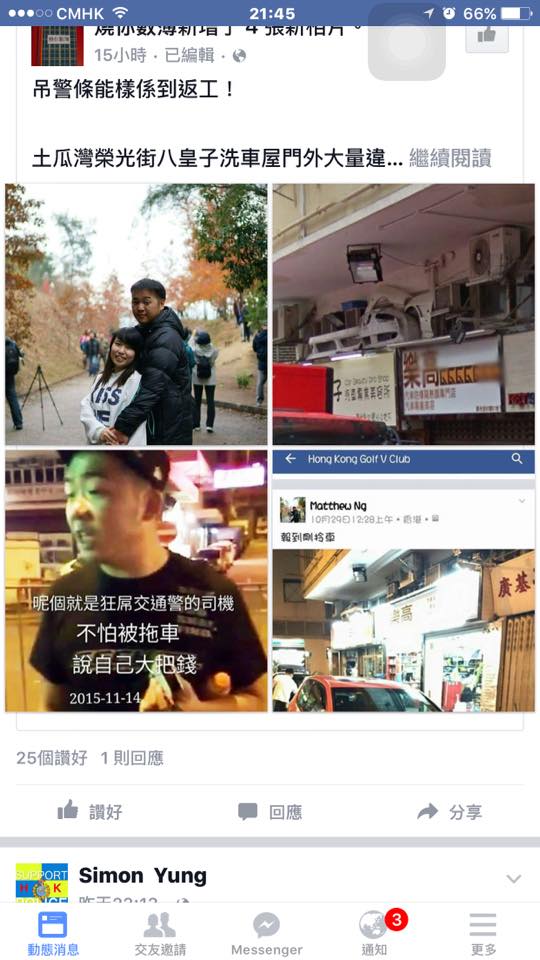
It would also turn out that the
car washing operation does its work in the street. Immediately Internet users
filed police reports about the illegal car parking on that street, including
the shops using objects to block others from parking at their 'reserve
spaces'. Now there are police officers 24 hours a day issuing parking tickets
on that street.
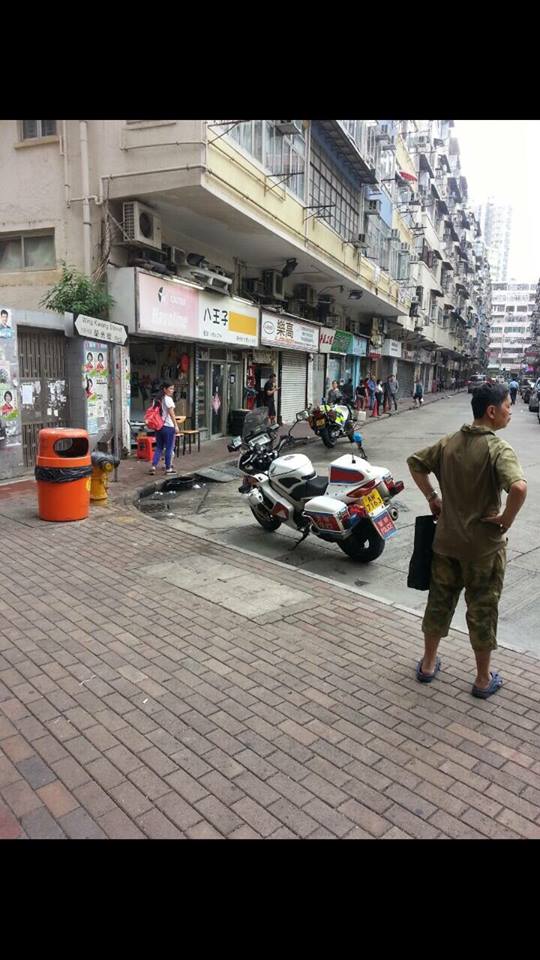
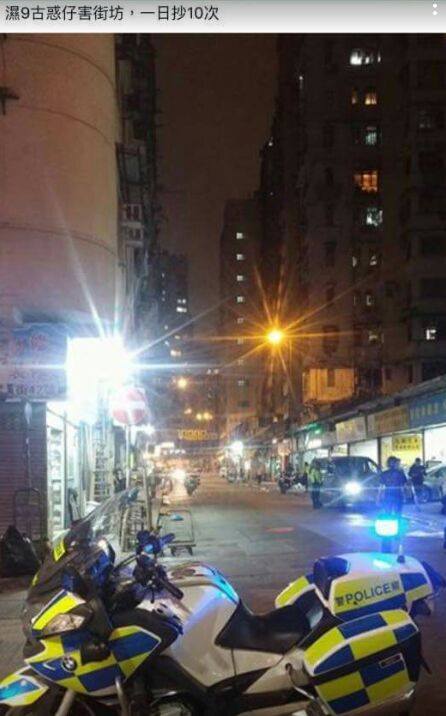
This is what the street looks like according to
Google Map before, with cars parked illegally.
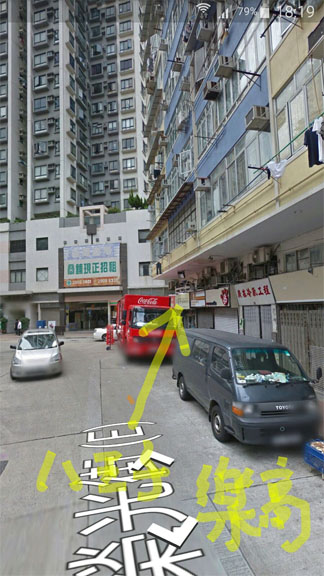
This is how it looks now with all the illegally
parked cars gone.
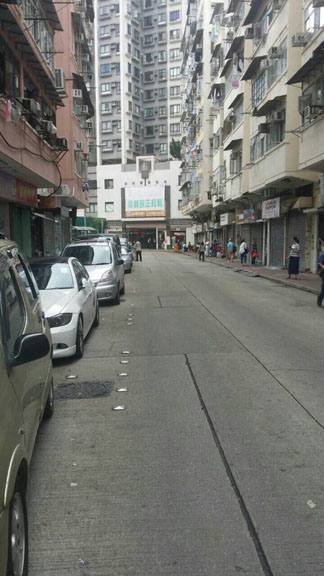
Videos:
https://www.youtube.com/watch?v=iTAkOL4Mskg A copy of the 9-minute
video taken by the companion of the driver.
https://www.facebook.com/308634672647539/videos/517885928389078/
Shorter 1-minute version.
0:01 Leung: Don't fucking touch me! I am prepared. You go ahead and tow. You
tow, dickhead! Fuck your mother! It's just a piece of cake. You drop dead!
Fuck your mother! ... What's the big deal? It's only several tens of
thousand dollars. You remember to stay here and wait. What are you writing?
You have fucking written it yet. Is it so fucking had to write words? You
write. Write. I am not finished.
0:56 Policeman: Can you wait?
0:57 Leung: No. I am in a hurry.
0:58 Policeman: I am going to fill it out.
0:59 Leung: You go ahead and fill it out. Why are you still fucking standing
around? Fill it out! Don't you know how to fucking write!? Fucking hurry up!
Moron! Fucking hurry up! What the fuck are you talking about? Dickhead!
Internet comments:
- In the case of
Couple vs. Hong Kong Police, the couple
thought that everybody would be on their side and found the opposite to their
surprise.
- The Golden
Forum lads really have to thank morons like Mr. Leung for providing them
with regular entertainment.
- The evolution of this story shows the power
of the Internet. From a YouTube video, it went to the Hong Kong Discussion
Forum where users kept pushing it until the mainstream Oriental Daily picked
it up.
- There will
never be criminalization of the act of insulting the police. To quote the
Civic Party: When citizens are doing what they consider to be right and
just, it is alright to insult the police for stopping them. But, of course,
the citizens must not be allowed to insult judges and lawyers.
- More developments: The heavy police presence
caused business to dwindle along the whole street, as customers can no
longer park illegally like they used to. The businesses have called on
Democratic Party district councilor Poon Chi-man to make a demand to the
Police Public Relations Bureau and the Transportation Department not to
chase away the illegally parked cars anymore. There is now a call for
Internet users to go down to Wing Kwong Street every day and make calls to
the police to complain about illegally parked cars. The police have to
respond to the complaints.
- More developments: Mr. Leung is a member of
an illegal car racing group called Copaze. You can see the sign of Copaze
placed in front of the car window in the video. Every night these Copaze
guys gather in front of Lok Go and create noise and pollution to the
consternation of local residents. After racing, they come back to Lok Go and
drink beer in front of the store. When neighbors get the police to come,
these guys insult them. Sometimes their cars even block the police cars from
going through the street.
(Wikipedia)
Radio Television Hong Kong (RTHK) is the public broadcaster of Hong Kong,
operated as an independent government department under the Communications
Authority.
(Wikipedia)
Police Report is a weekend RTHK programme in Hong Kong, similar to
Crimewatch in the UK or America's Most Wanted in the United States. It is
broadcast in English and Cantonese versions (broadcast as Police Magazine,
subtitled), and each episode differ only in broadcast language and cast. Each
episode is only five minutes long, and is televised on TVB Pearl on Saturdays
and ATV World on Sundays, following their evening newscasts.(HKG
Pao) November 16, 2015.
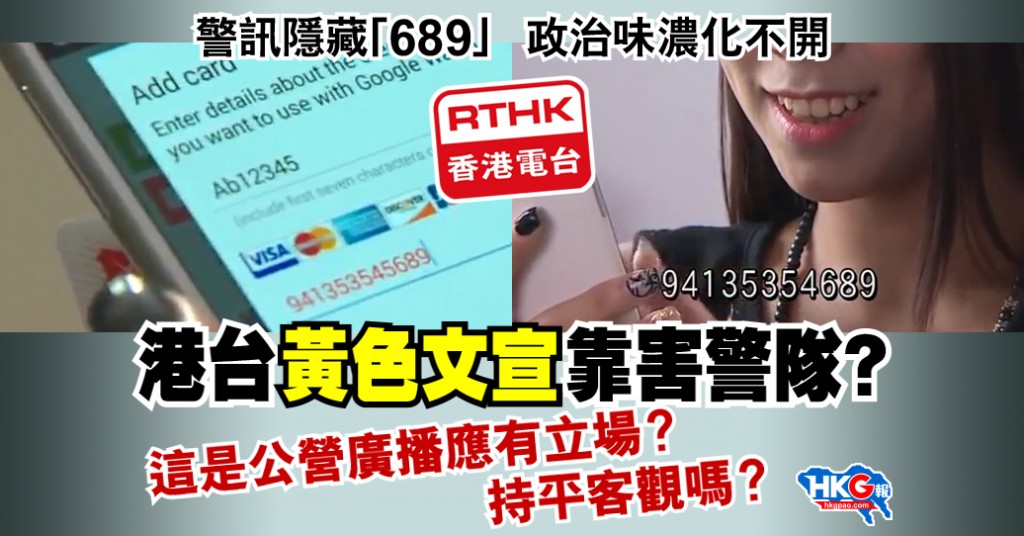
A recent episode of RTHK's Police Report
was to alert about telephone scamming. In the fictional story, the scammer
conned a credit card number out of the victim. Credit card numbers have 16
digits, but the example used here only has 13 of the numbers entered so far.
The numbers are 94135354689.
Immediately within hours of
the broadcast, the Yellow Ribbon media were in ecstasy because everybody who
knows Cantonese knows that these numbers have meaning.
'9413' is '九死一生', which means
that the situation is perilous with a 90% chance of dying and a 10% chance
of surviving.
'5354' is '唔生唔死' which means
neither dead nor alive, or suspended in limbo.
'689' is the codeword of Chief
Executive CY Leung, who was elected by 689 votes out of the 1,200-person
election committee.
Was this deliberate? Or was
this a mere coincidence?
Presently, Police Report
is produced by RTHK. The Hong Kong Police Public Relations Branch provides
the case files, the spokesperson, etc, but RTHK is responsible for
scripting. In this incident, the suspicion is that there were Yellow Ribbons
within the production team who sneaked in a piece of Yellow Ribbon political
propaganda. The Hong Kong Police are very unhappy, but there is nothing that
they can do.
In recent years, RTHK programs
and news reporting have been controversial because they slant towards the
pan-democrats. Almost all current affairs programs are premised on
criticizing the government. The City Forum is particularly notorious for
inviting mostly anti-government guests to blast the government. Internet
users use the homonym '傷港奠台' =(the mourning altar that hurts Hong Kong) for
RTHK.
Not only are the RTHK programs
getting more politically motivated, but they are also getting sloppier. In
this particular episode, the victim entered the credit card number 941353545689
but the scammer was shown to have received 94135354689. Someone was asleep
on the job.
When our reporter contacted
RTHK over this matter, the RTHK corporate communications team said that they
"didn't think there was any special meaning" and the colleagues in the
production team will respond. So far there has been no response yet.
Internet comments:
- What is the purpose of all
these shenanigans? In the short run, it is good for a laugh but it won't
change anything politically speaking. CY Leung isn't going to resign, the
Chinese Communist regime isn't going to collapse, etc. In the long run, this
is going to eventually hurt the independence of RTHK. Some day, the
government is going to send in a new management team. You can scream and
holler, but the government will simply produce a dossier of these
shenanigans to show that the old management team has lost control.

(RTHK)
November 15, 2015.
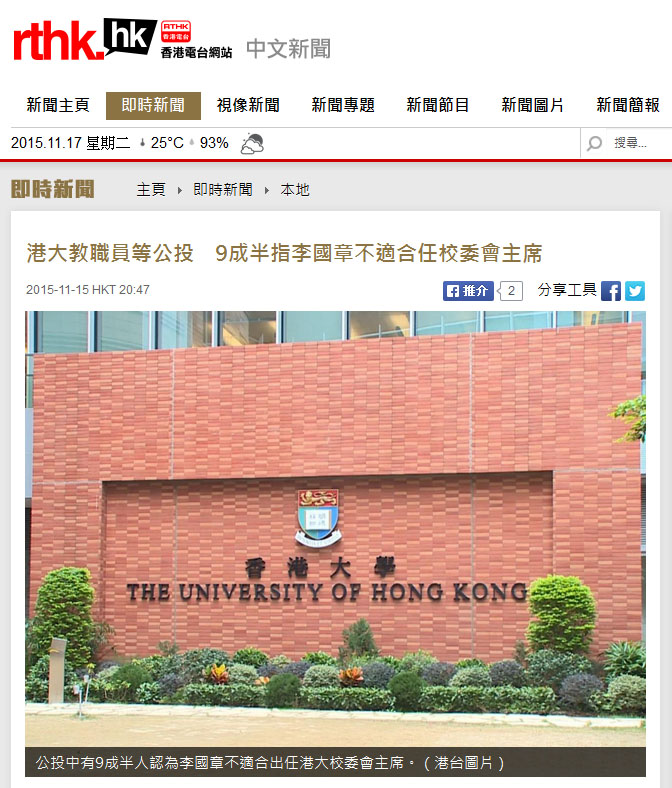
Headline: Hong Kong University academic staff
and others in referendum; 95% said that Arthur Li Kwok-cheung is not fit to
become HKU council chairman
The Hong Kong University Academic Staff
Association and the Hong Kong University Alumni Concern Group held a
referendum. On the motion "Arthur Li Kwok-cheung is not fit to become HKU
council chairman," 754 postgraduate students and academic and non-academic
staff members voted, with 95% agreeing and 2.4% disagreeing ...
(Speakout
HK @ YouTube) November 16, 2015.
When you read the headline, it
would seem as if almost everybody is against Arthur Li. But if you read the
details, it turns out that 148 academic staff members and 334 non-academic
staff members voted. That makes 482 in total. That number is 4.4% out of all
the 10,965 academic and non-academic staff at the university.
Interestingly, Cheung Sing-wai,
chairman of the Hong Kong University Academic Staff Association, had
previously said that a vote by 152 association members was highly
representative but this time he has an excuse for the low turnout. Cheung
said: "Previously we were able to spam all teachers and staff members but we
are no longer allowed to do so. I have gone out to knock on doors to tell
people to vote, but I found out that many many people were not aware of the
matter."
Well, at one
time, you said 152 was highly representative. Now you say that 482 is low
response. You sure know how to move the goalposts around.
Internet comments:
- For the year 2014-2015,
there were 8,767 taught postgraduate students and 2,749 research
postgraduate students for a total of 10,756 postgraduate students. 754
voters out of 10,756 is 7.0%.
Related link:
Hong Kong By The Numbers (#360)

(Wen Wei Po) November 16, 2015.

On November 13-15, Wen Wei Po conducted a
survey of the 2015 District Council election candidates. The survey was sent
to 587 email addresses listed by the Electoral Affairs Office. These were
the questions:
- Do you support Occupy Central?
- Do you agree with people calling the Hong
Kong Police as the "Dark (Evil) Police"?
- Will you support a second Occupy Central?
- Do you support the "Drive the Locusts out"
action against the mainlanders?
- Do you support the "Reclaim" action
against mainland parallel traders?
- Do you agree with establishing nationhood
for Hong Kong?
- Do
you support filibustering (in the Legislative Council)?
- Do you have any other opinions?
Among the 587 subjects, all 193
opposition candidates were evasive, some not even answering at all. The
Democratic Party fielded 95 candidates, but they refused to answer these
simple questions because "the candidates from the party are worried that their
responses may not be adequately and/or accurately presented and thus the
fairness of the elections will be affected to a certain degree."
Civic Party which was one of the parties which
started Occupy Central responded that the party was studying how to respond.
By the deadline, there was no reaction from them. The ADPL, League of Social
Democrats, People Power, Neo Democrats and other major opposition parties
did not respond. Some of the post-Umbrella organizations and "faux
independence" candidates did not respond either.
But the historical archive shows that many
members of the Democratic Party, Civic Party, Labour Party, League of Social
Democrats and People Power including candidates in the elections
participated in the unlawful Occupy Central, with some of them even having
been arrested.
(SCMP)
November 19, 2015.
Almost half of the self-proclaimed
"independents" in the district council elections are linked to
pro-establishment groups, the Post has found.
Although the candidates claim those groups
are not political bodies, the groups have taken a clear stance on political
issues, including taking part in anti-Occupy campaigns and expressing
support for the government's political reform package.
A scholar says affiliation with such
long-established groups should not be ignored by candidates given their
record of mobilising support for pro-Beijing candidates, but with no law to
regulate political parties, there is nothing the authorities can do about
such omissions.
The Post's check covered 117
candidates who declared themselves to be "independent" or "non-affiliated"
in their nomination forms. It did not cover 280 candidates who left a blank
in the political affiliation column.
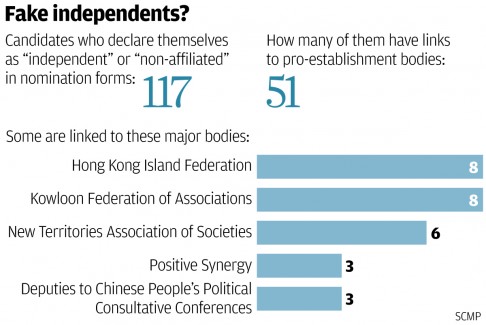
Of the 117 candidates, 51 are in one way or
another linked to pro-establishment groups. They may hold office, serve as
advisers, or are included in a "recommended candidates list" for members.
Marco Ma Yat-chiu is one of the eight
"independents" who failed to declare his ties with the Kowloon Federation of
Associations, which has the likes of Basic Law Committee vice-chairwoman
Elsie Leung Oi-sie as an honorary president. He is an executive member in
charge of recreational affairs.
"I want to be a true pro-establishment
candidate in name but no party invited me," said Ma, 38, who is seeking
another term in Kwun Tong's Hong Lok constituency.
He did not declare his affiliation because
the federation "was not a political party" and his role was minimal, he
said.
Other such organisations include the Hong
Kong Island Federation, which stresses the principle of "love the country
and love Hong Kong", and the New Territories Association of Societies. Eight
and six independent candidates are related to these groups respectively.
Positive Synergy, a younger group that was
set up in 2013, held a swearing-in ceremony for the 22 candidates in Kwun
Tong district last month. But at least three of them call themselves
independent and others simply left a blank in the affiliation column in
their nomination form.
The group prompted questions about its
political stance after an official from Beijing's liaison office attended
its launch ceremony. Its secretary is Wong Chun-ping, a former liaison
office official who became a district councillor.
But Positive Synergy chairman Bunny Chan
Chung-bun denies the group is close to Beijing. "We get together but we are
not a party. We are just a platform for independents to exchange views,"
said Chan, a deputy to the National People's Congress.
Meanwhile, three non-affiliated candidates
are provincial or municipal deputies to the Chinese People's Political
Consultative Conference. None of the four - Paul Law Siu-hung and Patrick Ko
Hiu-wing running in Yau Tsim Mong district and Roy Ting Chi-wai in Wong Tai
Sin - could be reached for comment.
Joseph Lam Chok, who is said to be dating
current Miss Hong Kong Louisa Mak Ming-sze, is among the dozens of names
included in the list of "recommended candidates" of the Federation of Fujian
Associations, which was leaked to the media last week.
Lam, vying for the seat in Wong Tai Sin's
Lung Sing constituency, denied suggestions that he was an "invisible
leftist". "I have asked my volunteers and supporters - none say they sought
the Fujian group's support. I don't know what happened."
Just as such candidates argue that some
Occupy protesters did not declare their stance, Edward Lau Wai-tak, an
Occupy activist vying for the seat in Central and Western District's
University constituency, said he did not state his affiliation to Island
West Dynamic Movement, which he founded with two other candidates, as he
considered himself to be independent.
"Our group is self-funded and subject to no
party's control," he said.
Dixon Sing Ming, a political scientist at
the University of Science and Technology, said affiliation to pro-Beijing
groups was key information that should not be concealed from voters. "A lot
of these societies were set up after the handover to mobilise support for
pro-establishment parties in elections," he said.
(Kinliu)
Judgment by Voting. By Chris Wat Wing-yin. November 21, 2015.
Have you noticed that we are seeing much
less of the color yellow in recent months? Even at the Lingnan University
graduation ceremony, they were only throwing white paper airplanes. Isn't
this odd?
When I went hiking, I ran into yellow
banners. At graduate ceremonies, there are yellow umbrellas. Also yellow
talismans with "I want genuine universal suffrage" are seen in the streets.
For one year, the color yellow was with us. Many people got rich and famous
through the Yellow Color Industry. Joshua Wong (where Wong means Yellow)
broke out during the storm and became a Yellow General. He came and went by
taxi, he attends a university but he is actually traveling all over the
world. Who knows how many classes he has cut, but he is certainly subsidized
by the taxpayers.
Whereas normal people see a Yellow
Disaster, the Yellow Umbrella Soldiers say that they are only seeking an
Utopia with democracy, freedom, rule of law, human rights ... they invoke
these sacred terms whenever they run into objections. As soon as they raise
yellow umbrellas, government officials, vice-chancellors, bosses and
citizens are scared stiff.
If the going is so good, they should keep
in going. So why is it that on the eve of the elections, they have quietly
folded up their yellow flags and use red, green, purple and anything but
yellow colors; they pretend that they are independents, they don't show any
umbrellas and they run their battles from hiding.
There is one explanation: deep down inside,
they realize that the color yellow repels people.
Only the umbrella soldiers who dare to
identify themselves, the radical localists and the mentally ill candidates
have declared aloud: "Occupy Central is guilt-free, rebellion is
reasonable!" The rest of the pan-democrats --- the Democratic Party, the
Civic Party, ADPL, Street and Neighbourhood Worker ... have all kept the
yellow color away. Emily Lau no longer shrieks "I want genuine universal
suffrage"; Alan Leong has wiped his smirk away and is now standing at the
street corner begging for votes and maintains a bitter smile when cursed out
by passersby. That is because they know that if they show their true selves
and let the citizens remember what they were like during Occupy Central, the
race would be a total rout.
These pro-democracy big brothers are now
saying that they are retiring and leaving a new generation to fight the
battle. Thus, they avoid judgment on election day. Even if the party loses,
they can blame the new generation for not being ready yet. That is better
than these Gods and Goddesses of Democracy being routed by a thousand or so
votes in district council elections.
The various signs indicate that even the
pan-democrats don't believe in Yellow Power. If they think that there was
this great revolution, then the city should be awash in yellow this election
month. There should be yellow banners, yellow signs, yellow flags, yellow
clothe everywhere. But if you do look carefully, you won't even find a
yellow ribbon.
This is about their vital interest --
getting votes. That is when people reveal their true faces. It was only
yesterday that they condemned the police as "black/evil" but today they are
visiting the quarters of the disciplinary forces and promising them nicely
that they will fight for retirement benefits. So it turns out that a pistol
in the belt of a policeman is much less damaging than a vote in his hand. I
don't think that the citizens will forget so easily. Let us use our votes to
render final judgment of the Yellow Army.
Internet comments:
- (Wen
Wei Po) On the question of support for "Drive the Locusts
out"/"Reclaim XXX"/Nationhood, every single of the 195 opposition candidates
refused to answer.
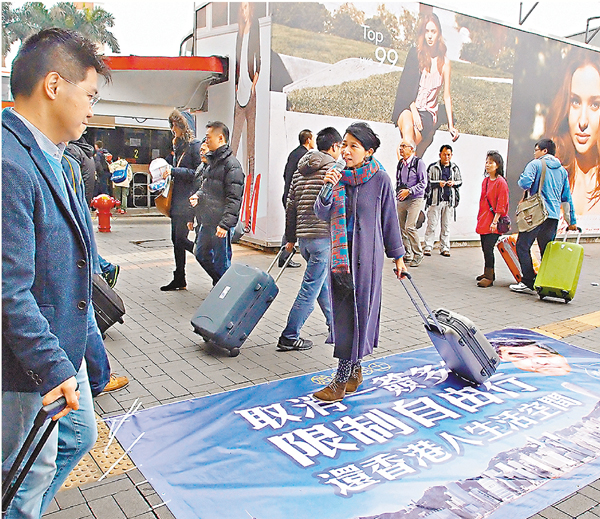
Claudia Mo (Civic Party) and Gary Fan Kwok-wai
(Neo Democrats) are two better known Localists who achieved by lugging
suitcases to express their dissatisfaction with mainland tourists. Kwok is
running for District Councilor. In recent years Kwok has raised the
Localistism in the name for "defending the interests of the people of Hong
Kong" but actually wanting to fight for Hong Kong independence. However, Fan
and the Neo Democrats will not answer the Wen Wei Po survey.
- (Wen
Wei Po) When Civic Party member Kenneth Tsang reported about being
"assaulted" by the police, Democratic Party legislative/district councilor
James To immediately said that those police officers were "Black (Evil)
Police" and that the Hong Kong Police is out of control. Labour Party
chairman Lee Cheuk-yan said with red eyes that the Hong Kong Police is
lawless. Later James To (now running for re-election in the Olympic
district, Yau Tsim Mong), Kwong Chun-yu (Democratic Party candidate in Pek
Long district, Yuen Long), Josephine Chan Shu-ying (Democratic Party
candidate in Siu Hong district, Tuen Mun) and others threatened to resign en
masse from the Crime Reduction District Committee to protest the secret
police torture.
At this time, in an
unprecedented move, the four police union for officers of various ranks have
issued an open call to their members to vote in the district council
elections for candidates who are positive and responsible. The four unions
of of the Immigration Department and the Correctional Services union have
also called on their members to vote for truthful, undestructive candidates.
The unions did not call for
their members to vote for specific candidates. Therefore they are not
violating neutrality. When they called for union members to vote for
positive, responsible and truthful candidates, this is as wholesome and
traditional values as
mom and apple pie (=something that cannot be questioned because
it appeals to universally-held beliefs or values). But everybody also knows
that the subliminal message is to vote against all those who have called them "Black
(Evil) Police" for the past year.
There are about 33,000 police
officers, 6,500 correctional services workers and 6,500 immigration
department workers. They also have families. The chances of them voting for
a pro-Occupy/Reclaim/Shopping Revolution candidate are nil. That is why the
opposition candidates have to be evasive on their positions.
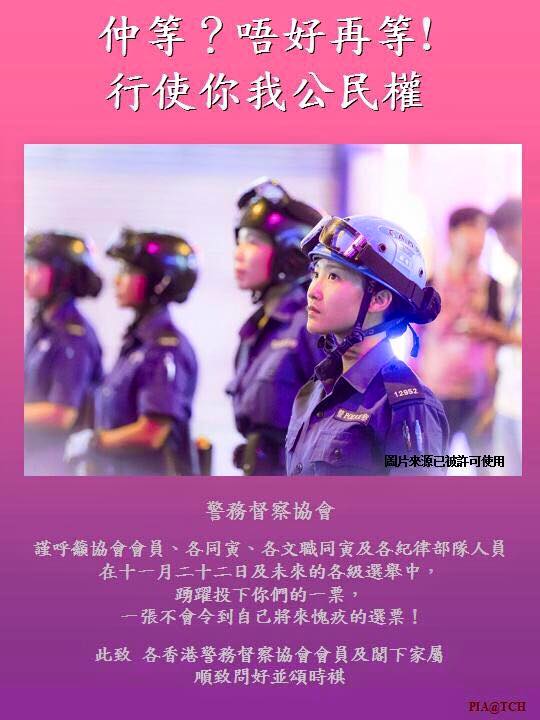
Hong Kong Police Inspectors Association
poster: Cast a vote so that you won't have any regrets in the future
- (Wen
Wei Po) As of May 2015, 1,003 persons have been arrested in matters
related to Occupy Central. Among the arrestees, 160 were prosecuted with
convictions on crimes such as unlawful assembly, sexual molestation, common
assault, possession of deadly weapons, theft, criminal destruction of
property, criminal intimidation, possession of Class I poison, careless
driving, etc.
With these District Council
elections, the opposition do not have a strong record in community work and
they are unable to stir up political issues. Instead, their big brothers and
sisters were involved in secret donation scandals and led the way to block
streets and prevent citizens from conducting normal lives, and they were the
cheerleaders behind their leaders. They necessarily have to run for cover.
When Albert Ho was accused of breaking the law as a lawyer, he responded
that "he was using peaceful and rational methods to resist." But this is
hardly convincing.
The Labour Party, People Power
and the League of Social Democrats rely on radical elements more so than the
Democratic Party and Civic Party. So even if "Occupy Central" is box-office
poison generally speaking, they can still count on the blind support of the
radical elements. But they would be fantasizing if they think that they can
attract some moderate voters. What resident in their right minds would
invite "the mice to enter their rice storage tank"? Who would want endless
filibustering in their District Councils?
- (Wen
Wei Po) The independent candidate Nadaze Hitsujiku (see
#337) was more forthcoming than the
Democratic Party, Civic Party or Labour Party. He responded to our survey,
but he also included a lot of comments laced with obscene language. For
example, he said that he supports the Umbrella Revolution but he opposes
Occupy Central because that never took place. "The Three Occupy Shames are
fucking useless. They should be executed by a firing squad." He also
condemned the government not having prosecuted the Three Occupy Shames as
yet.
He said that he "supports the
establishment of Hong Kong City-State sovereignty with Wan Chin becoming the
transitional president and the City-State Royal Family becoming officials in
the transitional government.
- The behavior of the closet
Yellow Ribbon candidates make one thing very clear. Previously during Occupy
Central, they said that they represent the people of Hong Kong. For example,
they ran a referendum during which they claimed to have collected 780,000
signatures in support of civil nomination of Hong Kong Chief Executive. If
they have popular support, then why are they running, ducking and hiding
their Yellow Umbrellas now? Why can't they stand up, hold up their Yellow
Umbrellas and say aloud: "I am Yellow Ribbon and I am proud." The silence is
deafening.
- (Oriental
Daily) Among the district council election candidates, about 40%
claim to be independent or free of political affiliation. This is a record
high in recent years. The Caritas Senior Citizen Association recently
interviewed more than 1,700 senior citizens aged 60 or older. 80% of the
respondents think that district council should be "honest and dependable"
and "frequently come into the community to meet with residents." 64% of them
would choose a candidate with no political party background. Analysts
believe that senior citizens distrust persons with political party
backgrounds because those people have the interests of their parties in mind
and not those of the voters. The ideal candidate is between 41 to 59 years
old. Interestingly, senior citizens do not favor young candidates because of
the lack of work and life experiences.
- Is so hard to answer 6
yes/no questions?
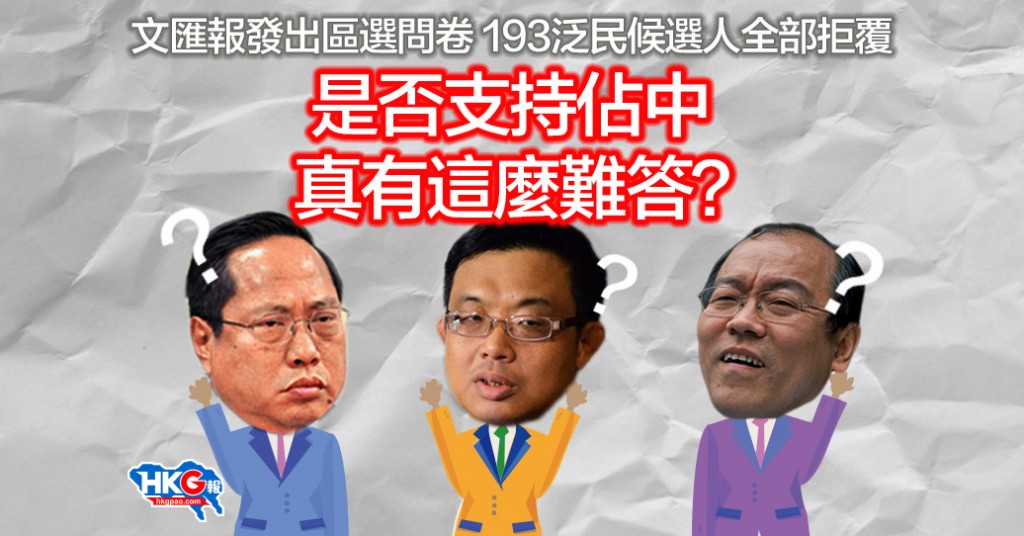
- Why is it impossible to
condemn the Black/Evil Police now? It was noted that there was a surge in
voter registration this year. If you check the increases by election
districts, those with the largest increases typically have
government-employee quarters (e.g. police married quarters, etc) within. Previously,
the police and other government workers were politically neutral. With the
coming of Occupy/Shopping/Reclaim, the police felt unjustly attacked and
insulted with the support of the pan-democrats. Their response was to urge each other to register and vote against
the Yellow Ribbons. Under such circumstances, no candidates in their right
minds would continue to call the police black and evil.
- Occupy Central may mean that
there are certain monolithic blocs that will vote against the pan-democrats:
-
The pan-democrats and Apple
Daily/Next Magazine were critical of the police, medical/health workers and
other government departments/organizations and their families (such as
identifying specific police officers and harassing them and their families
-
Those who were due to receive
housing subsidies, senior citizen subsidies, welfare payment increases, etc
found those payments delayed due to filibustering by pan-democrats
-
Those who work in the tourism,
hospitality and retail business which were affected by the Reclaim/Shopping
Revolution hostilities against mainlanders
-
Those who live and work around
Admiralty, Causeway Bay and Yau Tsim Mong saw their access blocked by
encampments
- (HKG
Pao) November 20, 2015.
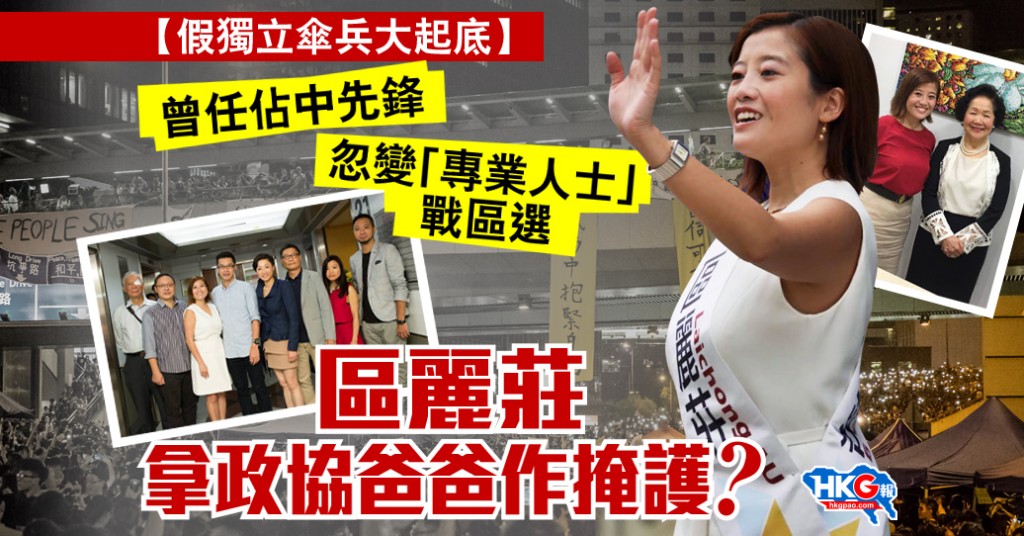
During Occupy Central, hedge
fund manager Edward C.K. Chin and his 80 or supporters were prominent (see
CNN). Now supporter Au Lai-chong has shown up as a "financial
professional" with "no political affiliation" to run in the Stubbs Road
district. She even mentioned that her father was a Communist Party Political
Consultative Conference in Macau in order to create impression that she has
nothing whatsoever to do with Occupy Central.
Unfortunately she made the
mistake of asking former Chief Secretary Anson Chan, Labour Party's Cyd Ho
and Civic Party's Tanya Chan and Lai Kwong-tak to join her at a rally.
If Occupy Central is just,
then why hide your involvement and pretend to be independent instead? Maybe
she knows that Occupy Central is very unpopular?
- Someone wrote (probably in
sarcasm) that the pan-democrats only want to give without needing to
receive. They are sincere people who are working for the good of Hong Kong.
Therefore they Occupied Central but they did not want to use that as the
reason to vote for them.
Sincere and good people?
If they are sincere and good,
they wouldn't have occupied Hong Kong for 79 days and stopped people from
working, attending school, shopping, visiting doctors, etc.
If they are sincere and good,
they wouldn't be taking American funds to cause chaos in Hong Kong.
If they are sincere and good,
they wouldn't be trying to give right of abode to foreign domestic helpers
and children whose parents are not Hong Kong residents.
If they are sincere and good,
they wouldn't be seeking judicial review of every single major
infrastructure project.
If they are sincere and good,
they wouldn't be filibustering in the Legislative Council and stopping Hong
Kong from forging ahead.
They've done a lot more bad
things, but I won't bother listing everything.
- (YouTube)
Grandpas and grandmas wagging middle fingers and cursing out Democratic
Party legislator Helen Wong.
Remember the Horse Carriage (Lau
Ma-che)? He is back with a
video
about the Paris terrorist attacks.
(Apple
Daily) November 15, 2015.
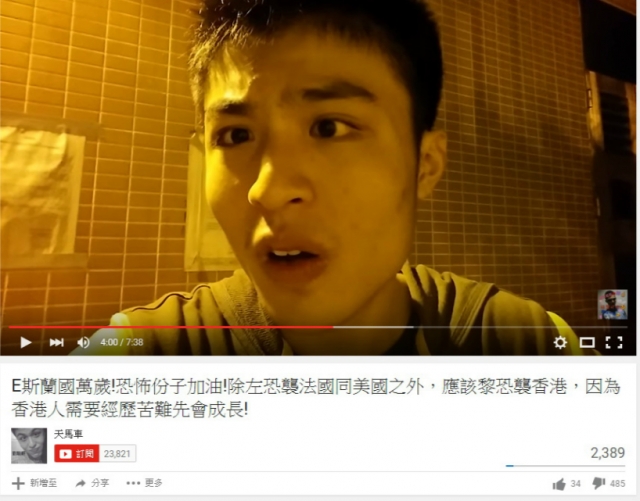
(1:10) I watched the news today. I see that
there were terrorist attacks in France. Concert hall, football stadium, they
were all fucking attacked by Islamist terrorists. A big massacre. Some dies,
some were injured. A lot of fucking people.
But the main point of what I
want to say is not to condemn or criticize those thugs. There is something
wrong. If you hate the government there so much, then you should send someone
to assassinate French president Hollande. If you hate Obama so much, you
should send someone to assassinate Obama. You should not be hurting innocent
citizens. This type of behavior is extremely shameful. That is to say, you
should be targeting the persons in charge. You can throw bombs at the
officials there, the French government officials, the Foreign Minister. How
can you go after the citizens instead?
But what I want to say is that Hollande, Obama
and the presidents and prime ministers of the large nations ... have they
reflected on their own problems? Why don't the Islamist terrorists, Al
Qaeda, ISIS, bin Laden ... they don't come after China. They don't launch
attacks against Singapore. They keep going after the large nations such as
France, the United States of America, etc.
That's because you bastards have
done so many evil things, you bully the smaller nations. You went to
steal Middle-East petroleum. If they won't join your gang, you blow away their
president. You use various methods, such as economic ones, to sanction the
small nations which can't defend even defend themselves. You force them to
submit. If Russia did not have a strong man such as Putin with his diplomatic
prowess, even Russia would have to yield. Fortunately, this world still has
Russia and China to put a brake on you.
The Americans ... whether during the First
World War or the Second World War, they always show up near the end to pick
up the spoils. Bastards! That is why I fucking hate Americans. The French
are no better.
Therefore ... what do I want to
say? Today you are running into these kinds of situations. Well, you had
it coming. Do you realize? Why do people go to the extreme with these
terrorist acts, including suicide attacks? 9/11. Have you thought about it?
You forced certain people to form a group to counterattack you. Obama,
Hollande, wake up! Bastards! Your actions laid the seeds of disaster for your
citizens and residents. There will be more coming.
I also want to say ... I can't remember ... I
have developed a mental block ... eh ...
Yes, I want to solemnly appeal
to Al Qaeda, ISIS and other terrorist groups in Syria and Afghanistan to send
some terrorists over to Hong Kong. I feel that Hong Kong needs to have a big
massacre. That is to say, I hope that you terrorists can do something.
I feel that most Hong Kong people are lower
life-forms ... lower than being low ... brainless dickheads ... just a
punch of little lambs who have never experienced any hardship or disaster,
who look towards the heavens every day and who live inside greenhouses. They
did not go through the Cultural Revolution. They have not gone through 3
years 8 months (of Japanese occupation). They have not gone through any
great war. They don't have military service. They are so fucking lucky. But
they have time for Occupy Central, fucking Hong Kong independence ... these
dickheads! Fucking Billy Chiu, Joshua Wong Chi-fung (sigh) fucking bastards!
Most (70% to 80%) of Hongkongers should be
sent to concentration camps. All the Hong Kong independence advocates and
the Yellow Ribbon dogs should be sent to concentration camps, just like what
Hitler did during the Second War. Move them all into concentration camps. I
give you terrorists unreserved greetings to come here and kill every one
that you see!
You really
have to. These people don't deserve to live in this world. They are wasting
resources, food and oxygen on Earth. Therefore the people of Hong Kong must
undergo a massacre ... I say so. As for Al Qaeda, the terrorists, Syria, ...
will you listen to me Lau Ma-che ... oh, you don't understand Cantonese?
Damn it! ...
Sometimes you should not be
superficial. Hong Kong people say "Oh, so tragic! France! So many people
died!" I fuck your mother's stinking cunt! Dickface! You don't even know what
is sorrow of the heart. You don't feel sorrow ...

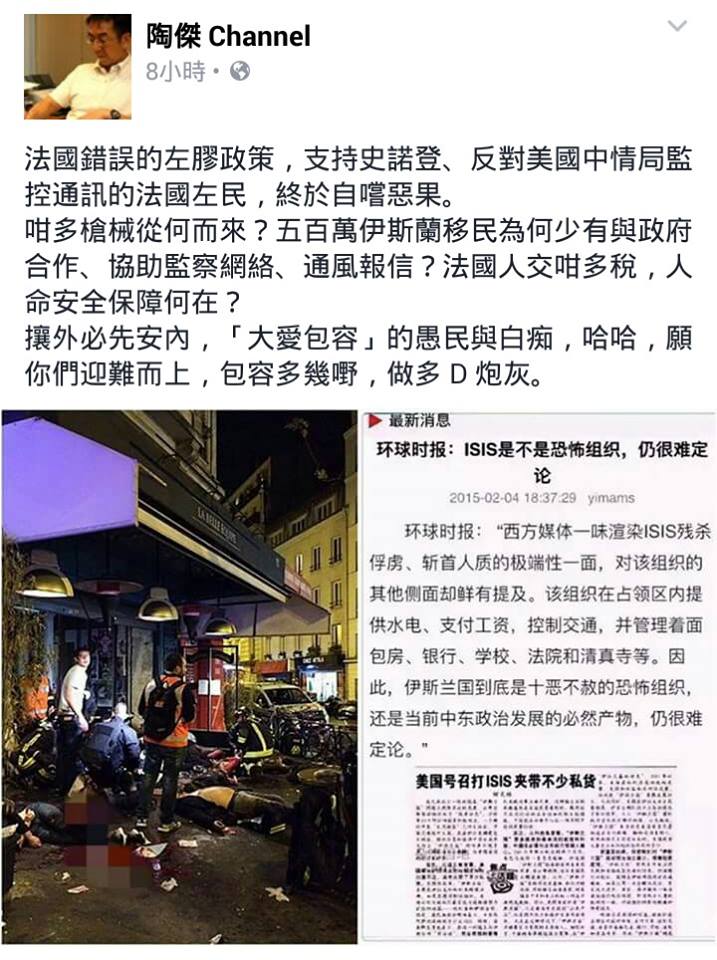
Chip Tso Channel
France's mistake was in its leftist retard
policies. They supported Edward Snowden and opposed the CIA surveillance of
French leftists, and now they are looking at the bad consequences.
Where do the many guns come from? What do so
few of the 5 million Muslim immigrants cooperate with the government, help in
monitoring the Internet and make denunciations? The French people pay so much
tax, but their personal safety is not guaranteed.
You have to fix your own country first before
dealing with the outside world. The fools and idiots who advocated "love and
tolerance" ... ha ha ... I hope that you can face this disaster with even more
tolerance and become more cannon fodder.

(Post852,
Post852) Yip Yat Chee's blog.
Today, switching the icon, adding the French
national flag on the Profile Pic, writing RIP and other similar acts are bound
to be criticized by certain people as "cheap expression", hypocrisy or (in
their words) a "fucking waste of time."
I want to ask them, What kind of expression is
not cheap? Go over there and kill a few ISIS members? Join the army and fight
the ISIS in the frontlines?
Is pounding a few lines on Facebook and
criticizing others for switching icons not cheap? Is that valuable?
Writing the same old Facebook criticisms again
and again not cheap?
Traveling to Beijing and yelling "The Communist
Party will collapse" is not cheap.
Traveling to North Korea and yelling "Down with
dictatorship" and "Liberate North Korea" is not cheap.
Traveling to Syria or another Middle-east place
to proclaim that ISIS is inhumane is not cheap.
These non-cheap expressions are a lot more
valuable than criticizing on Facebook other people's cheap expressions. Why
don't you go ahead and do it? Why do you only criticize on Facebook others for
being cheap? This is just fucking useless criticism!
In a society with freedom of expression, I have
my expression and you have your criticisms. We are all very "cheap." But why
am I cheap for switching my icon whereas you are not cheap for making your
criticisms?
P.S. Each person may have their different
understand about this incident. Switching the icon may only be telling the
whole world and those around us that we cannot bow to Evil. We must support.
But this does not mean that we are helping France. France will not collapse
because a few hundred people died. They don't need our help. They are not a
poor nation. If I have to actually contribute money, I am not going to tell
anyone. That is why there is nothing to worth discussing here.
"Why are you only concerned about the attacks in
France? Why aren't you concerned about the attacks in Lebanon? That is because
you are hypocritical and unjust."
Each time something happens in the United States
of Europe, such comments surface.
That is, if you cannot fairly care about
everything in every corner of the world, then you cannot care. If you care,
you are hypocritical and unjust.
In other words, if you are not a saint, then you
cannot fairly care. That would be even more immoral and evil than not caring.
Why did you cry over the hostage case in the
Philippines? How many people die each year in hostage incidents? But you
didn't care and you didn't cry. Therefore you are hypocritical.
Why did you cry over the Lamma Island ferry
case? You didn't come out to commemorate the sinking of the South Korean ferry
MV Sewol? Therefore you are hypocritical.
Why do you cry when you attend a funeral? So
many people die each day. Why don't you cry for others? Aren't all lives
equal? Therefore you are hypocritical.
When Leslie Cheung passed away, you were very
sad. But were you sad when other entertainers passed away? Why do you openly
rue the suicide of Leslie Cheung but not all others who commit suicide each
year? Therefore you are hypocritical.
You are concerned about the terrorist attack in
Lebanon today, but you were not concerned about every single terrorist attack
through the course of human history? Therefore you are hypocritical.
You donate money to the Red Cross Society, but
you don't donate to World Vision, Salvation Army, Doctors Without Borders,
etc? Therefore you are hypocritical.
You were an Orbis Moonwalker but you were not an
Oxfam trailwalker? You did not participate in every single charity event.
Therefore you are hypocritical.
Such stupid comments.
You were concerned about the terrorist attack in
Lebanon, so why aren't you concerned about the terrorist attacks in France?
You say that you very fair, and you are concerned about both. On the day of
the terrorist attacks in Paris, many people commemorated. You came out to
condemn these people as being hypocritical and unjust. You say that you are
equally concerned? Can you say that you were concerned to the same degree?
Being concerned about the Lebanon and not
carrying terrorist attacks anywhere else in the world is not hypocritical? You
think that you can get a rise? You think that you can be lofty?
I will continue to mourn France, because I
refuse to let the "leftist retard hegemony" interfere with my freedom.

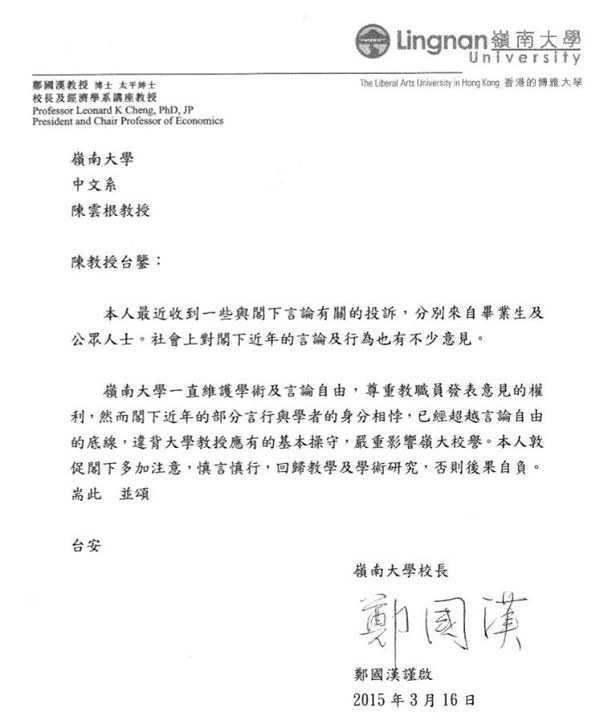
(Hong
Kong Free Press) LingnanU
president warns localist prof to æmind your words or suffer the consequencesÆ
By Kris Cheng. November 12, 2015.
A professor at Lingnan University has
revealed that he received a letter from the UniversityÆs president Leonard
Cheng warning him that his politically charged speech has hurt the
reputation of the university and that he should ômind [his] wordsö or else
ôsuffer the consequences.ö
Dr Chin Wan-kan, commonly known as his pen
name Wan Chin, is an assistant professor in Chinese at Lingnan. Chin
authored the book Hong Kong as a City-State and runs a popular
Facebook account advocating Hong KongÆs establishment as an autonomous
city-state in confederation with China and other East Asian countries.
Chin, a major figure in the localist
camp, is pro-democracy and opposes pro-Beijing parties and groups;
however, he has also said that pan-democrats ôshould be sent to hellö as
their methods for attaining democracy are no longer effective.
In the letter, dated March 16,
Cheng wrote that he had received several complaints from alumni and the public
regarding ChinÆs words, online media Local Press reported.
ôLingnan University has always defended
academic and speech freedom and respected staff membersÆ right to express
their opinions,ö Cheng wrote, ôbut some of your words and actions are
inconsistent with your role as an academic. They have crossed the line of
freedom of speech and [à] have severely hurt the reputation of Lingnan. I
urge you to pay attention, mind your words and actions, and return to
teaching and academic studiesùor suffer consequences.ö
Before becoming the president of Lingnan
University, Leonard Cheng was an advisor to Chief Executive Leung Chun-yingÆs
election campaign in 2012.
Chin also told Local Press that Cheng had
previously forwarded to him letters from various groups critical of his
work. Chin said that these were meant to put pressure on him, as his
contract with the University is due to end in August 2016.
ôThe warning letter from the president is
graceless and vulgar, blocking scholarsÆ speech and academic freedom,ö Chin
said on his Facebook page, ôThe phrase æsuffer consequencesÆ almost sounded
like words from a hooligan, bringing shame upon Lingnan University.ö
(Journalism.about.com)
Fairness
Fairness means that reporters covering a
story must remember there are usually two sides û and often more û to most
issues, and that those differing viewpoints should be given roughly equal
space in any news story.
Where is the other side of the story? Are you
suspicious? And even this side of the story arouses suspicion -- the letter
was dated March 16 2015 and today is November 13 2015. Why wasn't the letter
immediately published upon delivery?
(SCMP)
November 13, 2015.
Chin, who was criticised by complainants
for his ôlaw-breakingö role in the Occupy protests in Mong Kok last year,
said he believed ChengÆs remarks had targeted his city-state theory and
pro-Hong Kong independence standpoint. His guess was based on the letters
and materials relating to complaints received by ChengÆs office, which were
forwarded to him earlier this year.
Cheng might also be alluding to his remarks
about mainlanders, said Chin, who has been accused of discriminating against
parallel traders and insulting mainland women on several occasions. However,
Chin insisted he had not been discriminatory or insulting, but had
sarcastically condemned the traders for making their living out of Hong
Kong.
Chin said what Cheng meant by ôbearing the
consequencesö might refer to a possible termination of his employment
contract, which is due to expire in August. ôThere might be some trouble in
the renewal,ö said Chin, who added he would protest if he felt his contract
had been terminated unreasonably. He said he had already been relieved of
three administrative positions at the university in August, without being
consulted.
(Wen
Wei Po) November 13, 2015.
Our reporter contacted Lingnan University
about the basis for the letter from Leonard Cheng. The LU spokesperson said
that this was because Wan Chin expressed certain opinions in mid-March that
were seriously insulting to women and caused mass criticisms from Lingnan
University staff members, teachers, students, alumni and other members of
society.
Wan Chin has a prior record of insulting
women. In November 2014, Wan Chin shared a photo of Chinese University of
Hong Kong female student Shek Pui-yin with the comment: "We support the
cup-raising action (支持升cup行動)."
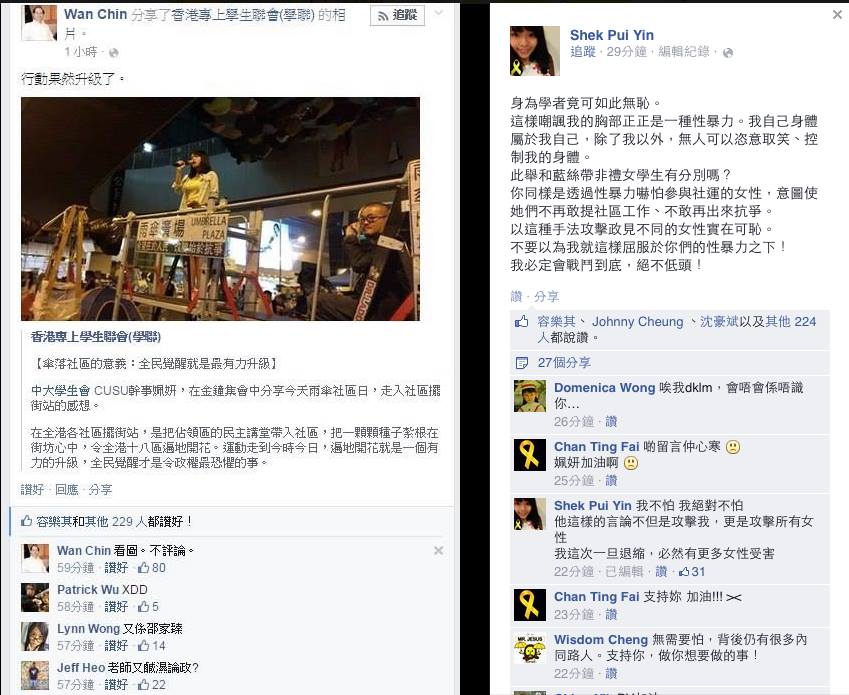
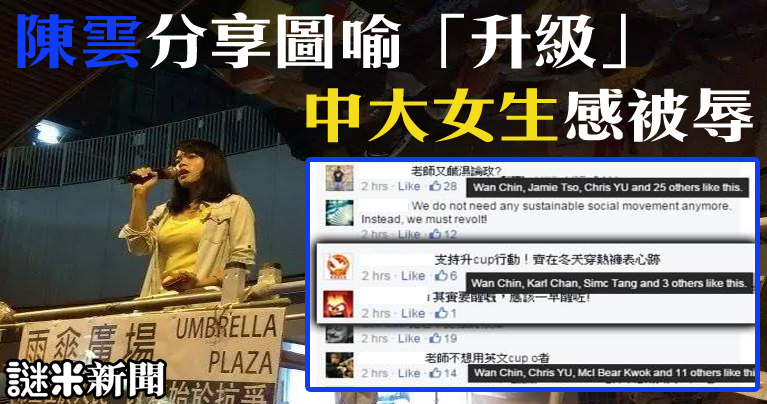
This was a play on the original "Support
the escalation of action" (支持升級行動),
but by replacing 級 with "cup", this
says to support breast enlargement. At the time, Shek Pui-yin said that it
was clearly case of sexual violence when Wan Chin made fun of her breasts.
"How can a scholar be so shameless?"
Given what happened, the Lingnan University
Student Union ignored the historical basis and went ahead to issue a
statement that the warning letter "is violently trampling on academic
freedom and free speech" while demanding Leonard Cheng to make an open
explanation and to withdraw the letter.
(SCMP)
Warning letter to Lingnan University's Dr Horace Chin Wan-kan was
well-deserved. By Alex Lo. November 15, 2015.
If you hold a university job and pose as a
scholar, you can automatically claim academic freedom against any and all
criticism. So Dr Horace Chin Wan-kan, spiritual father of
independence-seeking localism and an assistant professor at Lingnan
University, is hinting at political persecution after releasing a warning
letter he received from the school's president, Professor Leonard Cheng
Kwok-hon.
Cheng warned him in a letter dated back in
March that he should watch his words and actions, otherwise he would have to
bear the consequences. Sounds like a threat, doesn't it? Chin is the author
of several books on localism and Hong Kong being a city state, one of which
is considered a bible of the nativist movement. He reportedly said Cheng's
warning was targeting his city-state theory and pro-Hong Kong independence
stance. He said he was also worried he might lose his job next year when his
contract expires. The letter did not specify what questionable behaviour
Chin was guilty of. But back in March, people who followed campus politics
would know what Cheng was referring to.
A university official yesterday confirmed
that Cheng's letter was sent as a response to a message Chin posted in
mid-March. Chin wrote that mainlanders in Hong Kong are like Nazis, but Hong
Kong people must still be polite, otherwise they would be charged by police.
He wrote that Hong Kong women should let mainland men fondle their breasts
and wash their private parts to provide better service. He also wrote Hong
Kong men should keep quiet when being shouted at by mainland women, or risk
being arrested.
Chin's "satirical" message caused many
complaints from university staff, students and alumni. But of course, all
that was back in March. Memories are short and now without the context, Chin
is alleging persecution. His followers and pro-democracy diehards are
rallying to his cause.
That was not the first time. In November
last year, Chin posted a message making fun of Chinese University student
activist Shek Pui-yin's breasts by referring to her "cup size". I don't know
about you, but I think the warning letter was well-deserved, if not actually
too lenient.
Calls to Chin's university office were not
returned yesterday.
(SCMP)
Hong KongÆs ægodfather of localismÆ Horace Chin set to lose job at Lingnan
University. February 24, 2016.
A Lingnan University academic well
known for his localist stance is set to lose his job due to possible
non-renewal of his employment contract, which will expire in August.
Dr Horace Chin Wan-kan, 54, an assistant
professor in the universityÆs Chinese department, said this was likely as
the department had told him the renewal would not be recommended. In a
Facebook post on Tuesday, Chin said he had been removing books from his
office and was ready to leave the university.
A decision by university president
Professor Leonard Cheng Kwok-hon is expected. Chin will be notified about
the universityÆs decision next month.
The academic said on Tuesday that the
departmentÆs decision was made under political pressure.
Chin, who has a doctorate in ethnology from
the University of G÷ttingen in Germany, was previously an adviser to former
Secretary of Home Affairs Patrick Ho Chi-ping.
After leaving that job in 2007, Chin
published a book suggesting that Hong Kong should become a city state. The
book, which has been credited with inspiring the autonomy movement, is
widely seen as having laid the foundations of todayÆs localist movement.
Chin, also known as Chin Wan, is considered by many to be the godfather of
localism.
In March last year, Cheng warned Chin to be
careful in his words and actions, or bear the consequences. The warning came
in a letter written after Cheng received complaints from alumni and members
of the public about ChinÆs speeches.
In the letter, Cheng said: ôThe university
safeguards the freedom of academics and of speech, and respects the right to
express opinions enjoyed by the staff, but some of your words and behaviour
over the past few years contradicted your status as a scholar, and went
beyond the bottom line of the limit of speech freedom.ö
Without specifying which remarks he was
referring to, Cheng also said ChinÆs words and conduct had violated the
professorsÆ code of ethics and badly affected the universityÆs reputation.
Chin, who had also been criticised for his
role in the Occupy protests in Mong Kok in 2014, believed ChengÆs remarks
were directed at his city state argument and pro-independence stance. His
guess was based on letters and materials relating to complaints received by
ChengÆs office.
He said he expected his position would be
left vacant for a period as it was hard to find a writing instructor for the
department,
Chin was last seen publicly on February 20,
at a rally for Edward Leung Tin-kei, the candidate for radical localist
group Hong Kong Indigenous in the upcoming Legislative Council New
Territories East by-election.
A Lingnan University spokesman said on
Tuesday that he would not comment on an employment issue concerning an
individual staff member due to privacy concerns.
Internet comments:
- Is Wan Chin a (keyboard) "freedom
fighter"?
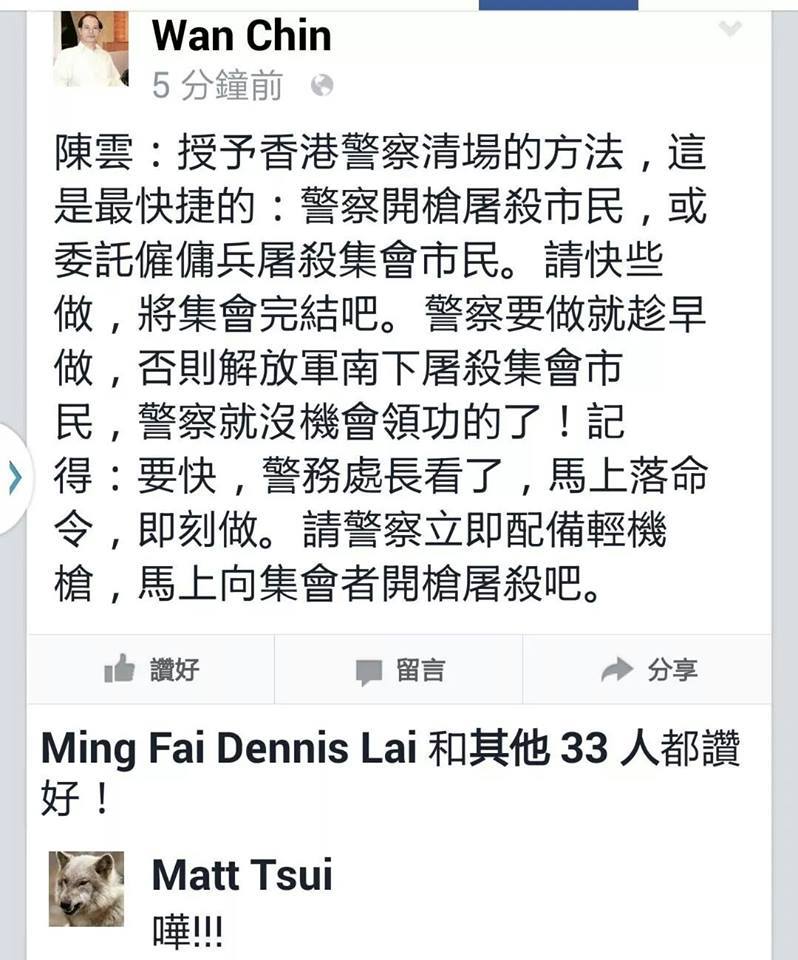
Wan Chin: I am providing the Hong Kong Police with a method for clearance.
This is quickest: The police open fire and kill citizens, or else hire
mercenaries to kill the assembled citizens. Please do so quickly and
terminate the assembly. The police must do so quickly, or else the People
Liberation Army will come south to massacre the assembled the citizen, which
means that the police won't be able to take credit! Remember: do it quickly.
As soon as the Police Commissioner sees this, he must issue the order
immediately to carry it out. The police should arm themselves with
sub-machineguns and immediately massacre those in the assembly.
(source:
memehk)
- Lingnan University has failed to produce
the allegedly offensive opinions of Wan Chin. We the People demand
that they be publicly re-published because we have the right to know. As you
know, the People's right to know overrides everything else.
- There are at least two parties who know what the allegedly offensive
opinions of Wan Chin are. Firstly, Lingnan University received complaints
from the community. Secondly, Lingnan University sent copies of those
complaints to Wan Chin. So if Lingnan University wants to hide behind
privacy/confidentiality, Wan Chin can publish them in order to establish his
own innocence.
- There is the frivolous excuse that if the opinions had offended certain
people, then they should not be re-published to repeat the hurt. That's
rubbish. We want to know what those opinions and we want to know the names
of those complainants so that we can make their lives hell.
- (Passion
Times) Why did this March letter appear only now? Wan Chin said that
at the time he had mentioned the letter on a <MyRadio> program and in his
own Facebook, but the media did not pay any attention. In July, he handed
the letter over to Apple Daily but there was no reporting. He said that the
mainstream media do not like him, because he criticizes them for being
biased on behalf of mainlanders and pan-democratic leftist retards. Wan Chin
said that the university has relieved him of various committee duties in
August without consulting him. He said that this is a signal that he may be
dismissed anytime now.
- Ah, here this is the gist of the matter -- a man fails to perform at work
and now plays politics to keep his job.
- Here is the likely target from March 11
2015. This is about the arrest of the four-eyed man who harassed a mainland
woman and her daughter during Occupy Tuen Mun (#152).
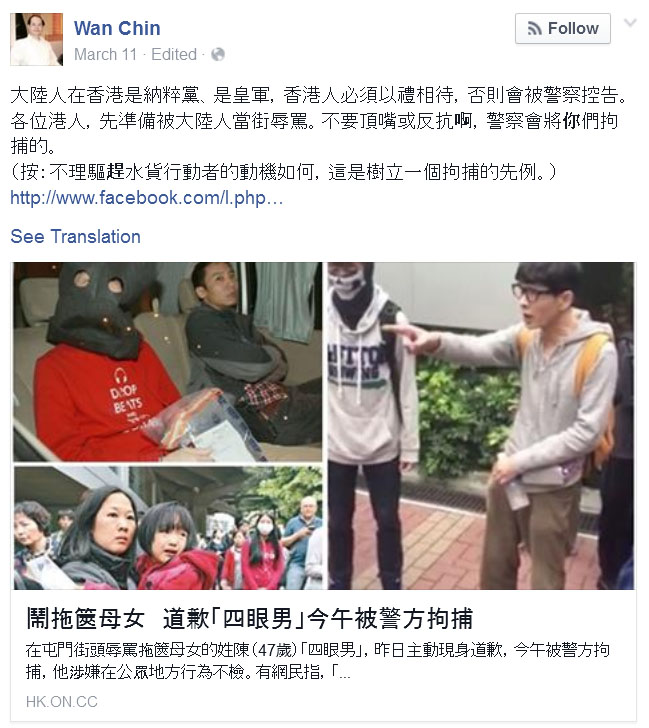
Mainland people are the Nazis and the
Japanese Imperial Army in Hong Kong. The people of Hong Kong must treat them
politely, or else the Hong Kong Police will prosecute. To the people of Hong
Kong, get prepared to get insulted by mainlanders in the street. Do not
retort or resist, or else the police will arrest you. (Note: It does not
matter what the motive of the anti-parallel trader demonstrators was. This
is setting a precedent to make an arrest).
The above Facebook paragraph is what exists
today. It is innocuous enough, and that is because it was scrubbed clean
before Wan Chin went public about the letter. It used to be this (see
Dadazim) (and also reported on March 14 2015 by
Wen Wei Po):

Mainland people are the Nazis and the
Japanese Imperial Army in Hong Kong. The people of Hong Kong must treat them
politely, or else the Hong Kong Police will prosecute. To the women of Hong
Kong, get prepared to have your tits squeezed by mainlanders in the street;
later one, please wash your vagina and get ready to provide service. To the
men of Hong Kong, please get prepared to be cursed out by mainland women in
the street. Do not retort or resist, or else the police will arrest you.
At the time, Wen Wei Po reported that a
citizen was vexed and angered by these remarks from a university
scholar, and posted an open letter to Lingnan University vice-chancellor
Leonard Cheng to criticize Wan Chin for insulting both Hong Kong and China,
expressing prejudicial views about mainlanders and disrespecting women. This
citizen wanted the university to pay attention to the matter.
- In the better days of Occupy Mong Kok,
Wan Chin demonstrated a series of martial arts moves to use a converted
plastic suitcase to fend off police baton attacks as well as
counterattacking.
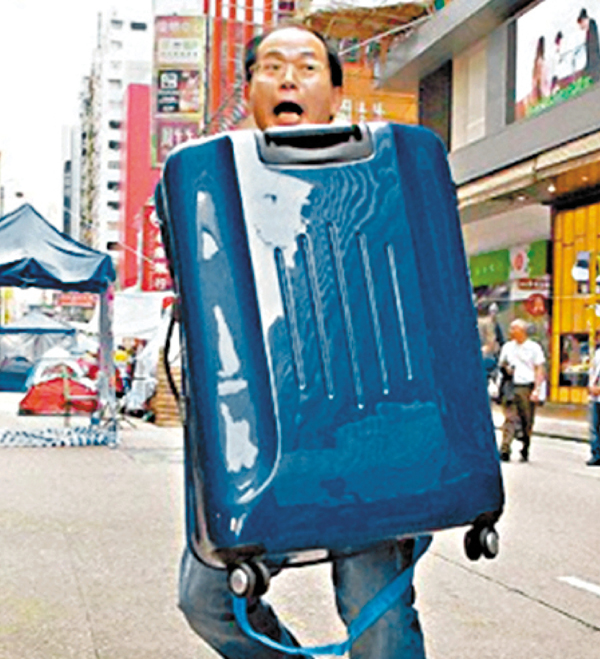
- (The
Stand) On Consultation Day at Lingnan University, a number of
students went after vice-chancellor Leonard Cheng for harming academic
freedom when he sent a letter in March to assistant professor Wan Chin.
Cheng replied that he failed to see any relationship between academic
scholarship and what Wan Chin wrote, which he said went beyond the
boundaries of free speech and negatively affected the reputation of Lingnan
University.
(Bastille
Post) November 13, 2015.
Joseph Lam Chok is the boyfriend
of Miss Hong Kong Louisa
Mak, and he is running in the Lung Sing district, Kwun Tong. The
incumbent councilor is Mandy Tam Heung-man (People Power). She is the chairwoman of the Galaxia Incorporated Owners in that district. Headline Daily has obtained a set
of Whatsapp exchanges between Tam and the building management. These included
a number of closed circuit television screen captures and other photos taken
by mobile phones. In the messages, Tam issued directives to the management to
use the photos to file complaints with the Election Affairs Commission to the
effect that Lam was campaigning on private property. In truth, these photos do
not show Lam campaigning, just that he carried the banners between his Galaxia
apartment and the street booth.

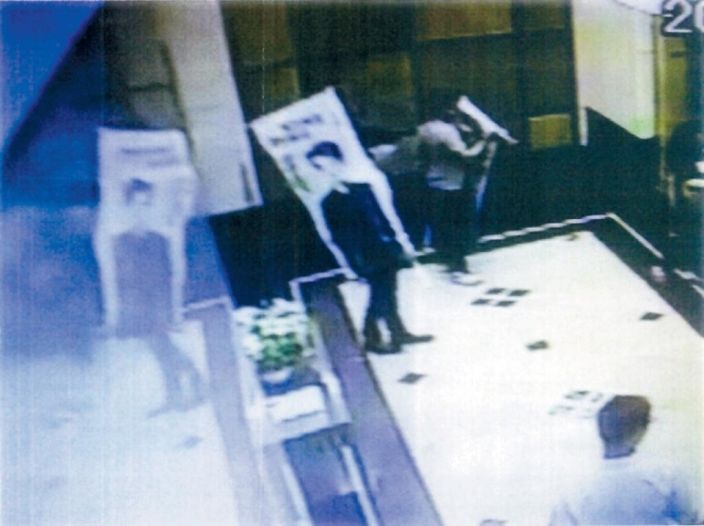
For example, Tam ordered: "Will the management
please file a complaint against Chok with the Election Affairs Commission?"
When the complaint was rejected by the commission, Tam reacted with a
criticism of the management: "This is because we are relying on a management
company that does not carry out the orders. This company is very
disappointing." The response of the Election Affairs Committee included a
statement on the collection of private data and advised the complainant to
read it carefully. This means that the use of close-circuit television
screen captures is dubious. In the Whatsapp messages, a management worker
wrote: "It is not standard usage to take screen captures of close-circuit
television recordings" and "doing so may be a violation of privacy laws."
According to another Galaxia Incorporated
Owners board member, Tam often handles board matters directly with
the management on her own without consulting other board members. Therefore,
he was unaware that she had instructed the management to file a complaint
with the Election Affairs Commission based upon private information.
(EJinsight)
Novmeber 13, 2015.
Mandy Tam Heung-man, who is seeking
re-election for a seat at the Lung Sing constituency in Wong Tai Sin in
district council elections this month, has been accused of infringing the
privacy of another candidate, Joseph Lam, by misusing her position at a
private residential estate.
Tam, who is the chairperson
of the incorporated owners of a Galaxia building in Diamond Hill, is facing
allegations that she instructed some security guards from the Galaxia
management company to monitor the activities of Lam, who lives at the same
building, Headline Daily reported.
Lam,
who turned a barrister this year at the age of 26, is the boyfriend of
Louisa Mak, who was crowned Miss Hong Kong 2015.
Images of Lam captured from GalaxiaÆs CCTV
recordings, as well as pictures taken with mobile phones, were said to have
been passed in WhatsApp group chats involving Tam and several staffers from
the buildingÆs management office.
Tam is
believed to have instructed management office staff to file complaints with
the Electoral Affairs Commission (EAC) against Lam for allegedly taking his
electoral campaign into the private premises.
When the complaints were not accepted by the
EAC, Tam is said to have vented her displeasure at the management company,
saying that ôit is disappointing that ISS Eastpoint (the management company)
cannot execute instructionsö.
According to sources provided to Headline
Daily, several management office staff had left messages in the group chat
that they would badmouth Lam so that he would lose support from residents.
However, there were no mentions of any specific tactics they would use.
In a letter obtained by the newspaperÆs
reporters, which was sent from the electoral officer of the Lung Sing
constituency to the management office of Galaxia, the officer acknowledged
receipt of a complaint filed by the management office against Lam. However,
the officer has attached a guideline on collecting personal data, which
seemed to suggest that the use of captured CCTV images might not be
appropriate. A management officer who didnÆt want to be identified told
reporters that they were once told by the EAC that using CCTV captures could
violate the privacy ordinance.
When approached by reporters on Thursday,
Tam admitted to seeing Joseph LamÆs photos taken by the management office,
but added that it was necessary for her to look into the matter as she was
the chairperson of the ownersÆ corporation. She had to take note as there
had been complaints that some district council election candidates had
conducted promotional campaigns in private premises in violation of rules.
The Lung Sing constituency consists of some
19,000 residents from the HOS housing estate Lung Poon Court and the private
estate Galaxia.
(Headline
Daily with video) November 13, 2015.
0:16 Headline Daily found that all copies
of its newspapers were removed to a remote corner on Friday. In the past,
the newspaper was distributed in every corner of the estate for people to
pick up themselves. A security guard said that they received complaints that
the contents have a bad influence on children.
0:29 Question: Is Headline News not distributed today?
0:30 Security guard: There is a problem. The management has to review and
approve it. It affects children.
0:45 Question: Who is making these arrangements? Did you know what Headline
Daily is publishing today?
0:49 Security guard: It is better that we inspect it first.
0:52 Question: It began today?
0:53 Security guard: Yes. Somebody complained today. Therefore we have to
wait ...
1:00 Question: Who issued the ban order? He says that he doesn't know. Is it
because of the front page story? He says that he will have to inspect it
first. Another security guard came and said that the ban order applies only
on this day.
1:14 Security guard: This applies only today
1:14 Question: Why?
1:15 Security guard: Because a customer complained, saying that there is
some content inside that affects children.
1:20 Question: As to how they know about the contents before the newspaper
was delivered, he said that they were notified by management. This directive
is only good for today.
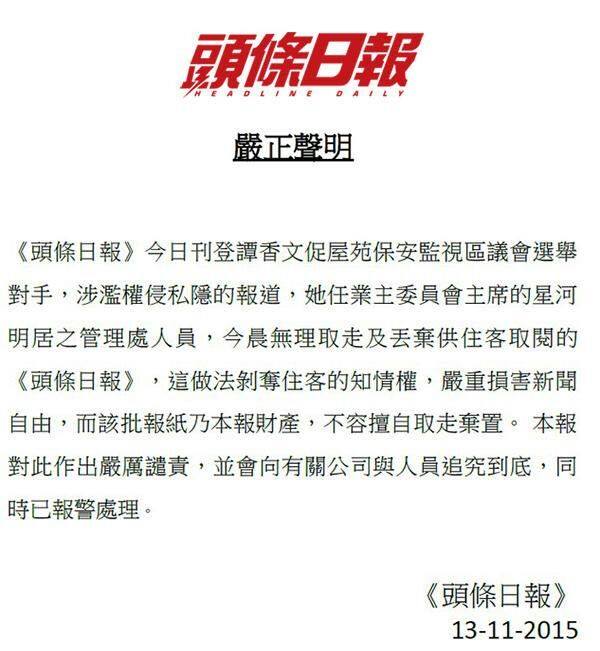
Headline Daily: Solemn Declaration
Today <Headline Daily> published a
report of Tam Heung-man urging the estate management security guards to
monitor her opponent in the District Council election and thus she is
suspected of invading privacy. This morning the management of Galaxia where
is the chairperson of the incorporate owners removed and discarded copies of
<Headline News> left for the residents. This deprives the residents of their
right to know and seriously damages the freedom of press. Those copies are
the property of our newspaper and cannot be removed or discarded at will.
Our newspaper is making a severe condemnation and will intend to pursue the
matter with all those involved. We have also filed a police report.
November 13, 2015.
- (Wen
Wei Po) November 15, 2015.
<Headline Daily> said that more than five
hundred copies of the newspaper with the front page story on Mandy Tam
violating Joseph Lam Chok's privacy were sent to Galaxia early in the
morning, but the security guards stopped it. When asked by the <Headline
Daily> reporter why the newspaper was not being distributed as usual, the
security guard said that "there was a complaint about the contents." When
asked how anyone could make a complaint before the newspaper was even
delivered, the security guard said: "I am just carrying out orders."
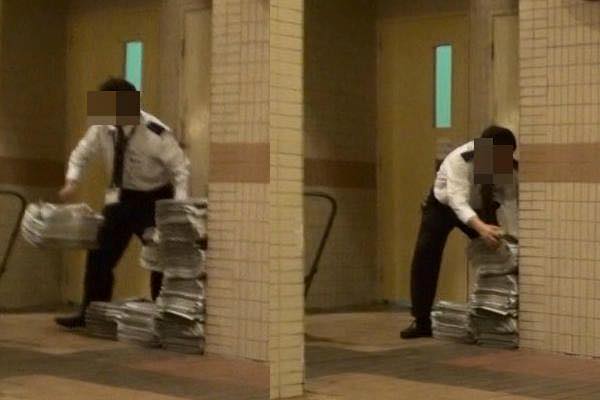
Several security guards removed the
newspapers. One resident saw the newspapers wrapped in black plastic bags
and left in the garbage room. One resident was unhappy at not getting the
newspaper and called the police. Others wondered if this was a case of abuse
of authority to kill off unfavorable news coverage. When the <Headline News>
reporter asked Mandy Tam at her street booth, she got angry and said: "I am
not going to respond. Please go away!" Then she warned the reporter: "Don't
make trouble." Tam and her assistant entered her office quickly and called
the police to complain about being harassed. Tam took photos of the reporter
from inside her office. The reporter waited until the office closed at 9pm but Tam
never appeared.
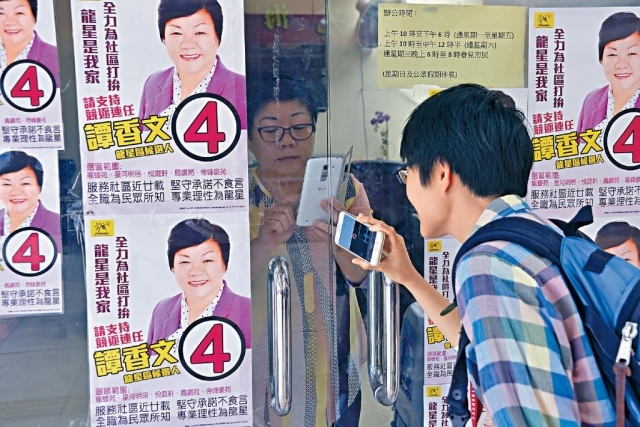
Yesterday morning, Mandy Tam resurfaced as
a keyboard warrior on Facebook about the newspaper delivery story. She said
that she only found out afterwards that the Galaxia management had received
complaints about "pornographic contents" within <Headline Daily>. According
to procedure, the distribution of the newspaper had to be stopped. "It was
misleading for <Headline Line> to mix the matter with the suppression of the
citizens' right to know in order to malign Mandy Tam." But she avoided the
question about how someone knew about the contents before the newspaper was
even delivered and made the complaint about pornographic contents.
Tam explained that she was promoting her
campaign as usual when "two tough men came to yell at her." "Although they
claimed to be reporters, their demeanor was definitely not that of a normal
reporter." For her own personal safety, Tam called the police for help.
"Afterwards someone identified the two men as being possibly triad gang
background." She pointed out that she has been facing a relentless barrage
of attacks during this campaign, being "repeatedly smeared by many media
outlets and unknown persons in a systematic fashion."
Meanwhile a "Calling for 100,000 persons to
oppose the Evil Police" Facebook posted a photo of the <Headline Daily>
reporters. This Facebook administrator claimed to be a retired policeman and
thought that the two reporters "looked familiar ... they seem to be Sun Yee
On members who are active in Wong Tai Sin." Later the administrator said
that people have told him that the two are reporters, but he said that "I
still strongly condemn <Headline Daily> for ordering its reporters to use
gangster tactics to create news."
<Headline Daily> condemned the malicious
smearing of its reporters and demand these actions to stop. The newspaper
has also filed a police report.
(Headline
Daily) November 16, 2015.
In the 2011 district council election,
there were two voting stations in the Lung Sing district, one at the
Children and Youth Integrated Services Centre in Lung Poon Court and the
other at the Po Leung Kuk Mrs Maris Cheung Lifelong Learning Institute for
Seniors in Bel Air Heights. Both sites are near Galaxia.
TMandy Tam was very concerned about where
the second site will be located. On October 11, Tam established a Whatsapp
group that included Galaxia management people. On October 12, they went to
the Electoral Affairs Office and the Po Leung Kuk to petition the
continuation use of the Po Leung Kuk site and the designation of the Galaxia
Club House as the second site. In the Whatsapp conversations, Tam stated
first that the banner should use Tam's name and stated as campaign
advertisement. But in the end, the petition was made in the name of "a group
of Galaxia residents."
The Electoral Affairs Office chose to keep
the Lung Poon Court and not move to Galaxia. Meanwhile the Po Leung Kuk
refused to let the Bel Air Heights site be used. So the Electoral Affairs
Office moved the second site to Chun Tok School on Hammer Hill Road. Tam was
not happy with this arrangement. On October 25, she demanded in the Whatsapp
group that the management make several large banners to protest against the
Electoral Affairs Office for not heeding public opinion. She said "Please
call the cleaning company to send people over to assist." She told the
workers to keep the action confidential. On the next day she asked the
management to send two cleaners and one security guard to protest, but "it
was inappropriate" for herself to participate.
According to Galaxia resident Mr. To, he
has seen management workers making banners for Mandy Tam many times in the
estate. He asked the workers: "What has this got to do with Galaxia?" At
first they ignored him. Then he scolded them: "You are employed by Galaxia,
so you cannot be working on things unrelated to the estates." Then the
workers removed the banners. Previously he had seen the workers making a
banner for "fighting for re-election." He angrily threatened to "report to
the Independent Commission Against Corruption" before the banner was
removed.
(Headline
Daily) November 19, 2015.
During the district election period,
candidates can obtain voter information (including name, address, email but
not telephone numbers) from the Electoral Affairs Office. To do so, the
candidates have to sign confidentiality guarantees.
Our newspaper obtained a number of audio
recordings involving Galaxia employees. One employee named Sun said that
Mandy Tam requested that "workers add the telephone numbers onto the list of
voters" and arranged time schedule to call the voters to vote "under the
signature of Galaxia management." Another employee questioned whether voter
registration information is private and confidential, "the voters only gave
the information to the Electoral Affairs Office and did not want it to go
outside. Is there going to be a problem?" The employee named Sun said,
"There's going to be a problem." Afterwards the employees also discussed
sending out text messages. Sun said that if the messages go out under
Galaxia, then it will have to be counted as campaign expenses. Therefore,
Sun recommended anonymous messages.
The Galaxia management company told our
newspaper that their workers should not be involved in any work that is
unrelated to to estate affairs, including political or election matters.
Mandy Tam did not respond to our many calls of inquiry.
(Headline
Daily) November 20, 2015.
Galaxia owner Chan Yung-chin had previously
helped Joseph Lam Chok to distribute flower on Mother's Day. On the evening
of the day before yesterday, he went home and found a laser disk in front of
his door. This disk contained several files with audio and text. He played
them and was disturbed to hear his own name mentioned many times. "I was
shocked. I listened and I heard my name mentioned many times." Chan went to
the police. He said that the contents of the files involve someone
disclosing private information to the estate management in violation of
election regulations; someone abusing authority for personal gains; someone
violating the privacy of Galaxia residents; someone breaking the law
together with Galaxia management workers.
Our newspaper obtained even more audio
recordings. One of them was made last Friday after we reported that Mandy
Tam urged the security director to monitor Lam Chok. The management workers
were trying to determine just who made the leaks. The workers asked the
security director named Sun about the reports about Tam. Sun said: "The
material is pretty accurate." Sun added: "She was surrounded by reporters in
front of Lung Poon Estate and had to dodge inside her office." The workers
also referred to the Whatspp contents mentioned in the newspaper report. Sun
said that the Whatsapp group has many members, but the leaker is not yet
known. "You cannot trust anybody except yourself."
Our newspaper have tried to contact Mandy
Tam to understand the affair, but she did not respond. She will hold a press
conference today.
TVB video:
https://www.facebook.com/HongKongGoodNews/videos/978971568843446/
(Apple
Daily) November 20, 2015.
According to Mandy Tam, she said that the
voting booth was moved away from the housing estate so the estate management
has the responsibility to notify the residents. She said that Ms. Chow at
the management company did not have the time or manpower, so Chow asked Tam
for the list of registered voters. Tam said that she had questioned whether
the estate management has the right to use voter registration data. But Ms.
Chow said that she wants to use the voter registration data to identify the
Galaxia voters.
As for a Galaxia owner receiving a laser
disk containing communications between Tam and the Galaxia management about
voters, Tam condemned the secret recordings as "vile and shameless." Tam
said that she will seek damages through legal channels over the leaks of the
text messages and emails. She said that this whole actions was "premeditated
and planned smearing." She said that this may be connected to her vote on
constitutional reform en years ago.
As for the Galaxia management holding up
copies of the newspaper that reported Tam ordering the estate management to
monitor Joseph Lam Chok, she said that she did not respond because she
respects what the estate management does and besides she was busy
campaigning and unaware of what was happened.
Tam described herself as a harmless woman
who is being besieged by the media recently, including reporters chasing her
without identifying themselves or seeking appointments ahead of time. As a
result, some volunteers are too scared to show up.
(LinePost
@ YouTube) November 20, 2015.
At the press conference today, the Headline
Daily reporter asked: The evidence shows that Mandy Tam issued an order
through the Galaxia management company's internal Whatsapp group to a Miss
Chow to release information of the Galaxia voters. So why are you
"completely blaming others"?
Mandy Tam did not directly answer this
question. Instead, she wants the reporter to "spill out" who leaked the
group messages and audio recordings to the press. She pointed her finger at
the reporter and asked: "Why was it leaked to you reporters?!"
The reporter said that the source of the
information cannot be disclosed due to confidentiality. The conference ended
this way.
Internet comments:
- I am betting on the Journalists
Association giving their disappearing act with respect to this flagrant
breach of the freedom of press. Why? Because Mandy Tam's nickname is
"Goddess of Democracy" and she is a renowned fighter for
freedom/democracy/justice/human rights/universal suffrage/universal values.
- I am betting on the Journalists
Association replying initially that they do not have sufficient information
yet to comment. Then they will diligently make sure that they don't seek the
information.
- I am betting on the Journalists
Association coming out with a statement three days later that condemns
removing/discarding newspapers in general without naming Mandy Tam on the
grounds that journalists must remain neutral and not become the news itself
and affect the election outcome.
- This is the third day since and still nothing from the Journalists
Association.
- (HKG
Pao) Yesterday Mandy Tam was handing out leaflets in the street.
When asked, she admitted that she has seen the photos taken by the building
management. She denied abusing her powers. She emphasized that she suspected
that Lam was campaigning in violation of regulations in her role as the
incorporated owners chairperson and not as the opposing candidate. Then she
refused to answer any further questions.
- "Calling for 100,000 persons to oppose
the Evil Police" Facebook posted photos of Joseph Lam Chok with a person who
is allegedly the chauffeur of Lam Wu who is a deputy director of China
Liaison Office in charge of allocating votes in Kowloon. The photos were
taken by an unidentified citizen and given to the Facebook administrator.
Based upon this one photo, it is enough to conclude with 100% certainty that
Lam is supported by the Communists!
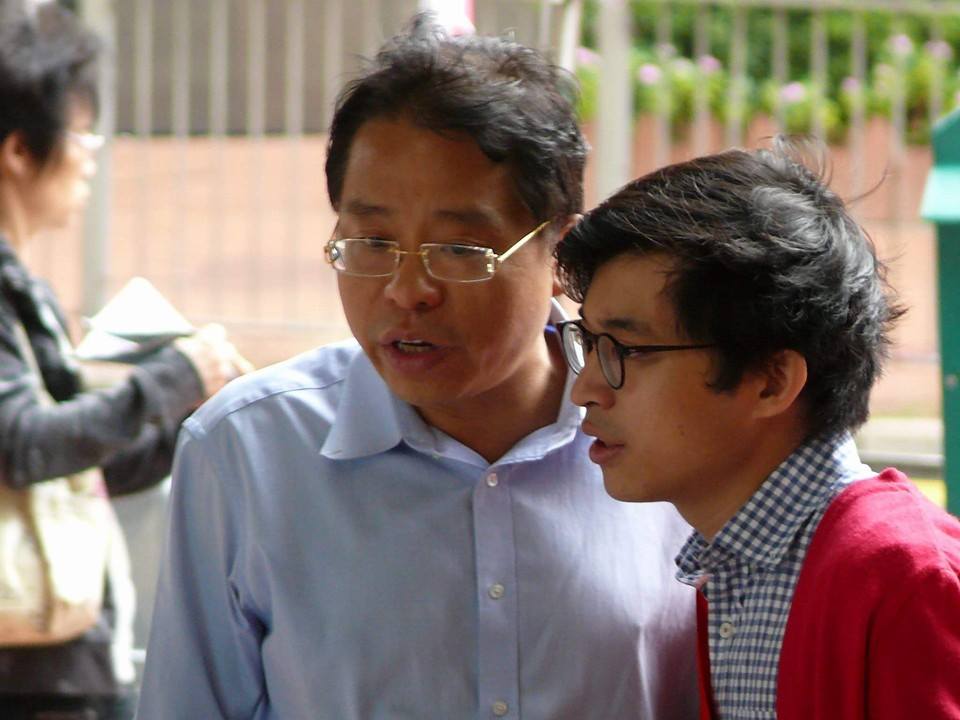
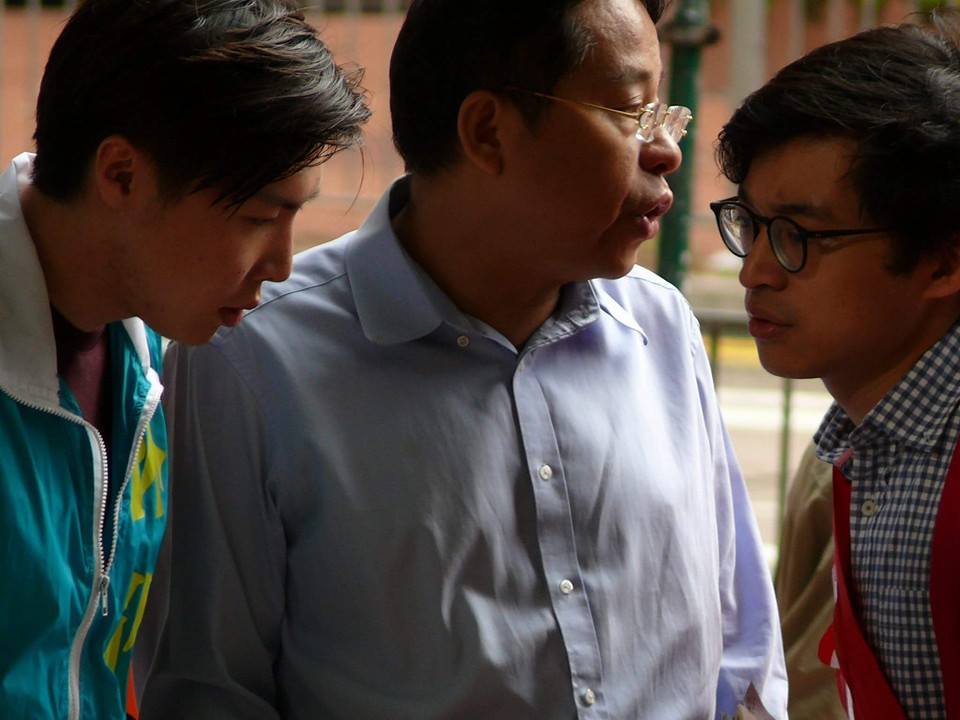
- The lighting in these photos is not normal.
And why aren't they looking at each other?
- The chauffeur of a deputy director of the China Liaison Office wears a
pair of Cartier gold-rimmed glasses worth $10,000! Living must be good over
there.
- Clearly the chauffeur bought fakes from Taobao for a couple hundred
dollars.
- Why is a human messenger being used? Have they heard of WeChat?
- (Headline
Daily) November 17, 2015. Our newspaper has determined that the
individual whose photo appeared in the "Calling for 100,000 persons to
oppose the Evil Police" Facebook is Kowloon East Chiu Chow Association
president Yeung Yuk-sing and he is not with the China Liaison Office. We
contacted Yeung and he acknowledged that he is the person in the photos. He
emphasized that he is not a chauffeur for a China Liaison Office deputy
director. Yeung said that he did not know Lam before, but he has heard of
Lam. Since Yeung drives to the Chiu Chow Association office in San Po Kong
often, he has seen Lam campaigning in the street. "This young man is
exceptional. He is not haughty. He can really do things. He is not fooling
around." Therefore he went down there to say hello personally. They spoke
for a few minutes, but then he noticed someone taking photos with a mobile
phone. The next day, the photos and the associated lies were posted on the
Internet. Yeung said that smearing is pointless because you need actual
accomplishments to win an election.
- "Calling for 100,000 persons to
oppose the Evil Police" Facebook said Aha Gotcha! Their misidentification of
the chauffeur of the deputy director of China Liaison Office was completely
ignored, but instead they have determined that Yeung Yuk-sing was a member
of the Communist Party Political Consultative Conference in Anhui province
and Shantou city. So?
- Mandy Tam won't answer the substantive
question but demands to know who leaked those Whatsapp chats. Oh, it sounds
so much like the Hong Kong University council leaks from Billy Fung! So what
about the people's right to know then? Whatever happened to that?
- How dare Mandy Tam Heung-man characterize
herself as a harmless woman? She is just one big fat slut.
-
https://www.facebook.com/368513580020590/videos/484841565054457/
https://www.facebook.com/bbtauseeworld/videos/428213417376041/
Mandy Tam being followed by photojournalists on election day.

(Wen
Wei Po) November 13, 2015.
Frederick Fung Kin-kee (ADPL) is a
legislative councilor who was elected as a district councilor. He is very busy
with his legislative council work as well as other political activities (such
as Occupy Central), he has neglected his District Council duties.
The Sham Shui Po District Council holds a
large meeting once every two months. Over the past 24 such meetings, Fung
was absent twice for a 90% attendance rate. However, he arrived late on 14
occasions and departed early on 15 occasions. He sat through the full
meeting only twice.
In
January 2012, the meeting started at 930am and Fung was gone by 1010am. On
January 2013, Fung was gone by 1220pm when the meeting went on to 730pm. In
May 2014, Fung showed up at 4pm which is 6.5 hours late. In June 2014, Fung
showed up at 235pm, which is 5 hours late.
Out of six committees, Fung signed up only
with the Environmental and Hygiene committee and the Housing committee. He
came later and/or left early 95% of the time. In the December 2014 Housing
committee meeting, he arrived on time at 930am but left at 950am after only
20 minutes, because that was the day of the clearance of Occupy Admiralty
and Fung needed to be at the scene to "monitor law enforcement by the
police." In the March 2012 Housing committee meeting, Fung showed up at
945am (late by 15 minutes) and left at 1010am after 25 minutes. In the April
2014 Environmental Hygiene committee, Fung showed up on time at 930am but
left at 1016am after 46 minutes.
(Wen
Wei Po) November 14, 2015.
Last evening Frederick Fung Kin-kee (ADPL)
issued an emergency appeal. He said that his opponent Eric Wong Chung-ki had
served Lai Kok as district councilor for ten years and then gave up the job
13 years. "He gave up Lai Kok 13 years. He thinks that he can win the seat
again with seven weeks' work? But given his past history with ADPL, every
vote that he gets is a vote taken away from me. He only wants to take away
my votes so that I lose."
Fung said that he is not in a habit of making
emergency appeals. But he has to explain the situation which is more severe
than any time in the past. The person who is taking away his votes is very
familiar with Lai Kok and ADPL. Some voters may not even know that he left
ADPL.
(SCMP)
November 20, 2015.
Whether pan-democrats can keep three out of
the five so-called "super seats" in the Legislative Council election next
year will hinge on the results of this Sunday's district council elections,
in which the camp is finding itself in an uphill battle.
A district council seat is an entry ticket
to the race for the super seats, as a candidate must first become a district
councillor before he or she can run to represent one of the super seats,
which are elected through a poll of the 3.2 million voters not eligible to
vote in any of the trade-based functional constituencies. With a larger
electorate spread over a broader cross-section of the population, the seats
have been labelled "super" because their holders can command a bigger
mandate than other lawmakers.
With the pro-Beijing camp seeking to
demolish the pan-democrats' all-important hold on one-third of the seats in
Legco, which enabled them to vote down the government's electoral reform
package in June, it is critical for the pan-democrats to hold on to the
three super seats.
Frederick Fung Kin-kee, an incumbent
super-seat legislator, said he faces a huge challenge in his bid to stay in
his district council seat in Sham Shui Po's Lai Kok constituency, which he
has occupied since 2003.
The veteran from the Association for
Democracy and People's Livelihood is being challenged by an unexpected rival
- Wong Chung-ki - a former colleague in the party who has returned after
quitting politics a decade ago to become a businessman.
Wong's entry into the fray will likely
split the vote in the constituency and hand Fung an even tougher task in his
battle for the seat with Chan Wing-yan, who is backed by both the Federation
of Trade Unions and the Democratic Alliance for the Betterment and Progress
of Hong Kong.
"If Wong can grab 300 votes from me, I
could lose," Fung said, suspecting Wong's motive was to divert his votes to
help the pro-establishment candidate win.
Residents have awarded Chan, 25, the
nickname "the flea catcher" after she arranged for pest removal services for
residents in run-down public flats.
Internet comments:
- Frederick Fung does not have a thing to
worry about because the Hong Kong University Public Opinion Programme found
that they are the most popular political party in all of Hong Kong (see
#363).
- If the ADPL is so popular, then why do they have only one (out of 70)
Legislative Councilor. And legislator Frederick Fung won the position as a
district councilor (District Council - Second sector). So if Fung loses the
district councilor post, he will have to go back to running in the
geographical constituency.
- Why does Fung keep talking as if Wong is
stealing his votes? How did he become the original owner of those votes?
Don't the voters have the right to decide for themselves?
- Emergency appeal? Where was Frederick Fung
all year last year? He only shows up during election time.
- Frederick Fung is just having to pay a long
overdue bill.
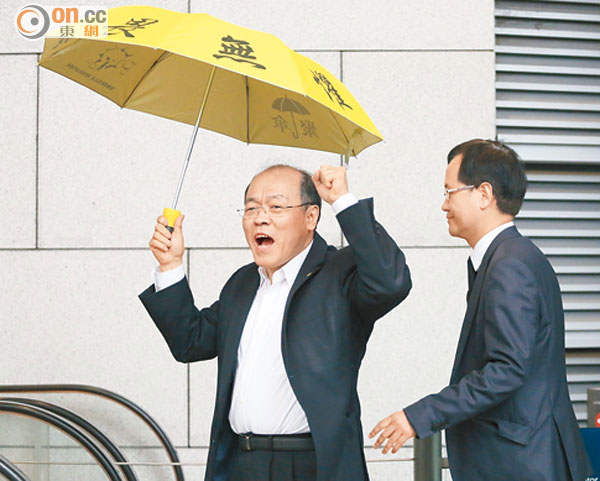
(Ming
Pao) November 14, 2015.
Yesterday 33-year-old ADPL candidate Li Kwing
in the Fu Cheong district, Sham Shui Po was knocking on doors at the Fu
Cheong estate. When he passed by the ground lobby, a man suddenly yelled
"You are ADPL! You are pan-democrat! You are a Chinese traitor!" The man
rushed up and punched Li. Volunteers eventually subdued the man and took him
to the front entrance to wait for the police. Suddenly the man broke away
and punched Li Kwing in the face.
The police came and arrested the 55-year-old
man named Chiu for physical assault. Li Kwing had bleeding lips and loose
front teeth. He was taken to Caritas Hospital by ambulance.

(Wen
Wei Po) November 13, 2015.
Yesterday on radio, Cheung
Chung-tai (Civic Passion) reminded people that Albert Ho (Democratic Party)
was viewing sexy girlie photos during a Legislative Council session. Ho said
that he has already apologized to the public and promised never to do so
again. Ho said that a person needs to be evaluated in totality. "I have left
this behind. I will do what I need to do. However, some people keep yelling
and screaming ... I don't think it means much." Cheng responded that the
incident not only reflects on Ho's personal conduct but also that "Ho never
respected the trust and support of the voters in the district." Therefore, the
residents need to mete out "the people's punishment."
Ho said that his periodic district council
work report shows that he has accomplished many things. Yuen Wai-chung (Lok
Tsui Garden Owners Association chairman) said that Ho has disappeared from
the district since he ran for Legislative Councilor/Chief Executive, and he
won't show up even if invited by the owners associations.
Ho said that it would be too narrow-minded
just to focus on district work. He said that he has also brought up Tuen Mun
issues at the Legislative Council including the Tuen Mun Hospital, the
western highway, the West Rail expansion, etc. "How can these not be related
to Lok Tsui?" Cheng said that while Ho boasted his vision, he was also
helping newly arrived immigrants to file the judicial review to remove
social welfare restrictions. Ho said that we cannot allow newly arrived
children and seniors to go hungry. "Is this humane? You have studied so many
books, and you still wind up like this!" Ho also made fun of the fact that
Cheng had studied in Beijing before. "Which Communists are you opposing?"
When Cheng was asked about the
so-called Restore Tuen Mun action, Cheng said that it was "natural and
logical" for "residents to save their own ailing community
themselves." Ho said that he
will not allow anyone to surround and intimidate women and children, or push
seniors down on the ground. "Will you be throwing bombs? Hong Kong is a
civilized society. Otherwise you could be hitting them with knives and
sticks!"
Cheng accused Ho misleading
the public. "If sticks can be used, the Hong Kong traitors including
yourself would have been punished by the people of Hong Kong!" Ho noted with
a wry smile that Cheng has violent tendencies.
Junius Ho (independent) said
that Occupy Central was illegal with plenty of "black gold" rumors swirling
around. Albert Ho said that he was "not sure". As for a lawyer acting openly
in contempt of court injunctions, Albert Ho insisted that "he was using
peaceful and rational methods to resist." "You can tell them to come and
arrest me. I have been arrested four times already." Junius Ho advised
Albert Ho to "wipe his ass clean in preparation for jail time."
(HKG
Pao) November 12, 2015.
In the 2001 district election,
Albert Ho won on a slogan of "Strive unceasingly, doing everything
personally" with a goal of "improving transportation." Afterwards he forgot
everything and his 2012 attendance record was the worst in the entire
council. In 2012, the Traffic and Transportation committee held six regular
meetings and one special meeting. Ho did not attend any of them. In 2012,
the Environment and Hygiene and Development committees held six regular
meetings, and Ho attended two. In 2013, Ho did not attend any of the special
Traffic and Transportation committee meetings; in 2014, his attendance race
improved to 43% but still not enough to pull him out of last place.

(Oriental
Daily) November 12, 2015.
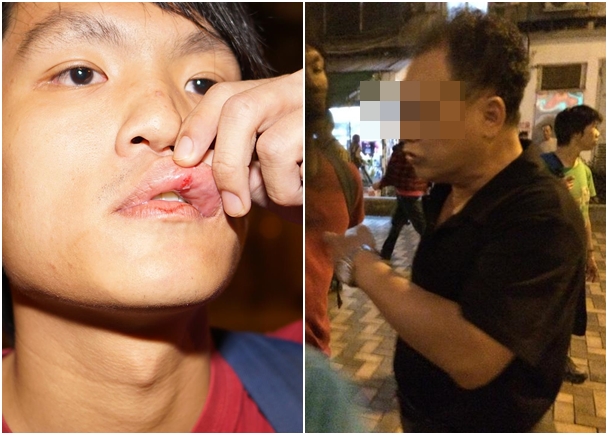
At around 530pm today, Ha Pak
Tin district candidate Sally Tang Mei-ching (Socialist Action) said that she and
her male assistant named Lam were campaigning at the corner of Nan Cheong
Street and Wai Lun Street. A middle-aged man suddenly came up and used foul
language to curse Lam, saying "You should not be criticizing Yan Kai-wing
(=incumbent district councilor)." When Lam took out his mobile phone to
film, the middle-aged man slapped the phone and hit Lam on the face
continuously for 15 seconds. Lam was bleeding in the mouth. He was hurt on
his hand and neck. Lam was sent to the hospital and the middle-aged man
named Leung was arrested by the police.
(Wen
Wei Po) November 14, 2015.
Did excessive noise level led
to violence in the election campaign?
Previously, Tang Mei-ching
claimed that she and her volunteer were handing out leaflets when a passerby
suddenly "physically assaulted" her volunteer for "almost half a minute."
She called the police for assistance. The police arrived and questioned the
citizens at the scene about what happened. Some of those present said that
they did not witness the assault on the volunteer. Still others said that it
was the volunteer who attacked the other person.
The League of Social Democrats
posted photos of the volunteer who was allegedly "physically assaulted for
almost half a minute." The photos showed clearly that there were no injuries
on the face and left hand of the volunteers. There was only a small cut
inside the lip. Meanwhile, Sally Tang with no evidence beyond "according to
residents" that someone had "seen" the other party assist her opponent to
hand out leaflets in the district.
The police confirmed that a
62-year-old man named Leung got into a quarrel with a 26-year-old female
named Tang and a 27-year-old male named Lam over noise levels. After
investigation, the police arrested Leung on suspicion of attacking and
causing actual bodily harm.

(Wen
Wei Po) November 9, 2015.
The post-Umbrella Revolution
organization North Of The Rings posted a photo of a metal gate splashed with
red paint. They said: "We have been smeared for taking money. We put up with
it! Today, we are threatened for wanting to defend our homes. We won't put
with the use of illegal voices to quiet our voices. This is completely
beyond what we can tolerate. So far about 1,300 Facebook users have clicked
LIKE and about 700 have SHARE'd. North of the Rings candidate in the Cheung
Wah district election Wong Ka-ho shared this on his Facebook.
The next day, North of the
Rings explained that at 850pm last Saturday, resident W left his apartment
to take part in campaign work. His wife and other family members were at
home. Suddenly Mrs. W heard a loud splashing sound outside the home. She
ignored it at first, but then she began to sense a pungent smell of oil. She
looked outside the door and found that the door was splashed by red paint. W
came home from the street booth at around 10pm and saw red paint everywhere.
He immediately contacted Wong Ka-ho and also called the police. There was no
sign of the perpetrators. The police is investigating the case.
One Internet user said that
the incident may be related to the earlier rumor about ties between the
Democratic Party and triad gangsters. Another Internet user said that the
deed is very similar to triad actions. According to a Facebook post, the
Democratic Party was colluding with the Wo Shing Wo triad gang to establish
a Cheung Wah Concern Group to monopolize the $47 million project to replace
water pipes in the Cheung Wah estate. The Democratic Party had said that
this post was seriously erroneous and reported the matter to the Independent
Commission Against Corruption.
The record shows that Wong
Ka-ho had developed hostilities with the Democratic Party's Chan Yuk-ming in
the district. So even though North of the Rings say that they are the
victims, some Internet wondered if this is a directed play to smear the
opponent. "The timing is so perfect, like a shooting a motive. Who is likely
to benefit the most? That would most likely be the mastermind behind the
curtain." "This is a directed play that generates sympathy (and possibly)
votes for a candidate who has otherwise zero chance of winning."

(Hong
Kong Free Press) November 9, 2015.
Red paint has been dashed on the offices of
district councillors Alice Lam Chui-lin and Chung Shu-kun. LamÆs office in
Siu Sai Wan Estate, Chai Wan, was vandalised with red paint on Sunday night.
A note from an unknown creditor asking for their money back was stuck on the
wall.
Speaking to HKFP, Lam said the
creditor was not looking for her specifically, but a friend of hers. ôHe used
to be a Liberal Party member, then he helped us organise a tea party. Now he
is a member of the DAB,ö Lam said of the friend. The DAB, the Democratic
Alliance for the Betterment and Progress of Hong Kong, is the biggest
pro-Beijing party in Hong Kong. Lam said her friend claimed to be innocent.
ôHe said he doesnÆt owe anyone money.ö
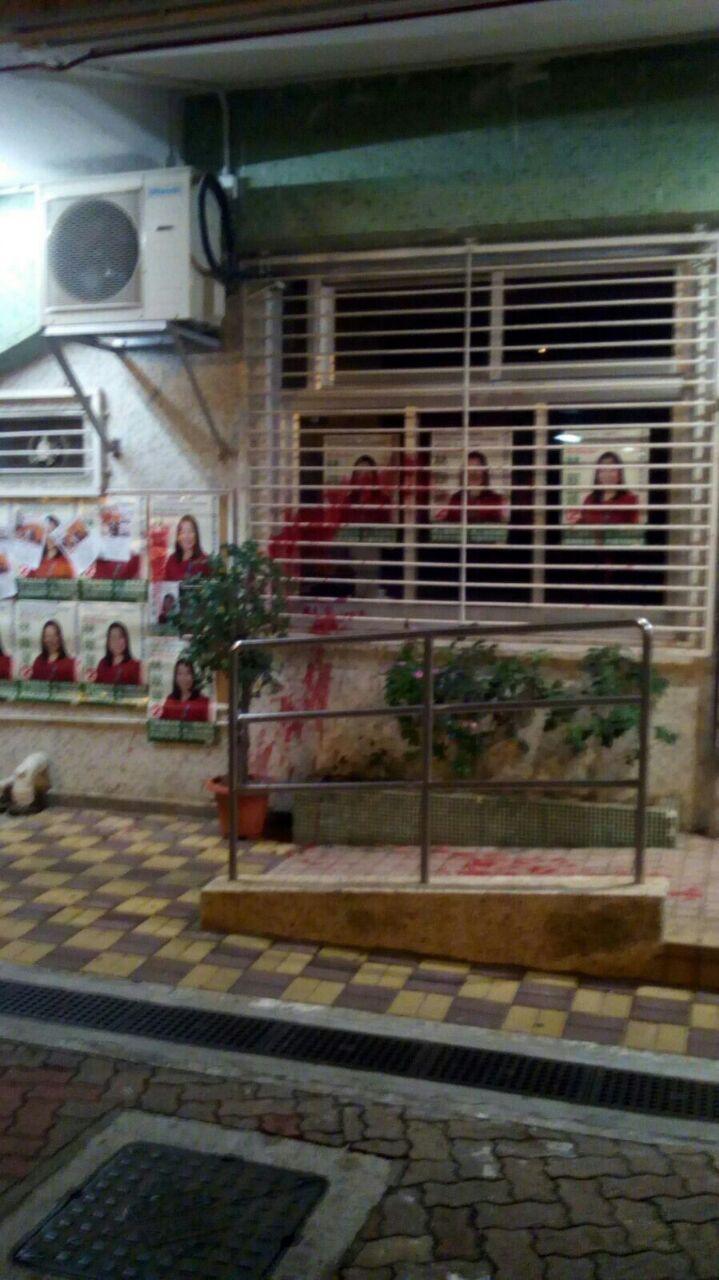
On Monday morning, ChungÆs
office, which is a few blocks away from LamÆs, was also attacked with red
paint. A spokesperson from ChungÆs office said she doesnÆt know what was
behind it.
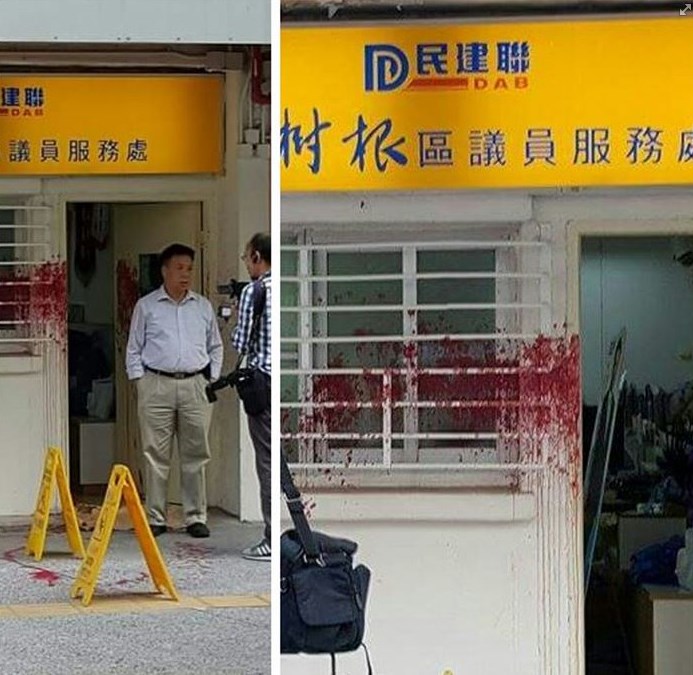

(Wen
Wei Po) November 10, 2015.
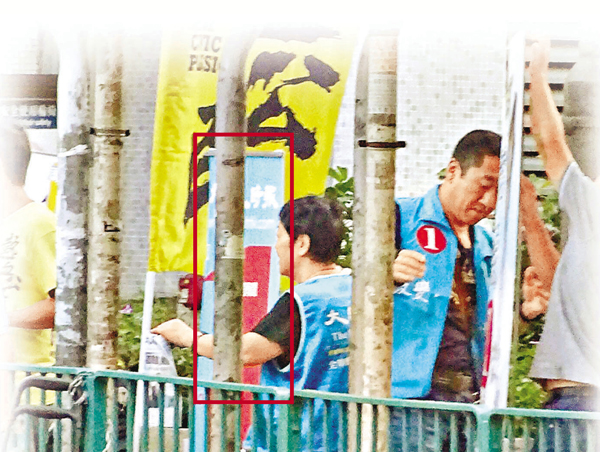
Yesterday morning at around
7pm, Junius Ho's volunteers clad in light blue vests began to distribute
pamphlets as usual around the Tuen Mun Pier. At the time, Civic Passion
volunteers were also handing out pamphlets nearby. At around 735pm, a woman
wearing the same light-blue vest joined Ho's group to hand out pamphlets.
This went on for about 20 minutes until a passerby who got a pamphlet from
this woman spoke to the other volunteers. It turned out that this woman was
handing out Falun Gong pamphlets. Meanwhile this woman left quickly.
According to photos taken at
the scene, Ho's volunteers wore light-blue vests with Ho's photo on the left
front side with the words "Change, very important" underneath plus a big
number "1" on the right front. The back of the vests has the words "Please
support Lawyer Junius Ho" in Chinese and English. Meanwhile the Falun Gong
woman came with a extensible banner with a big number "1" and wore a light
blue vest with the words "The Epoch Times" on the back.

(HKG
Pao) November 10, 2015.
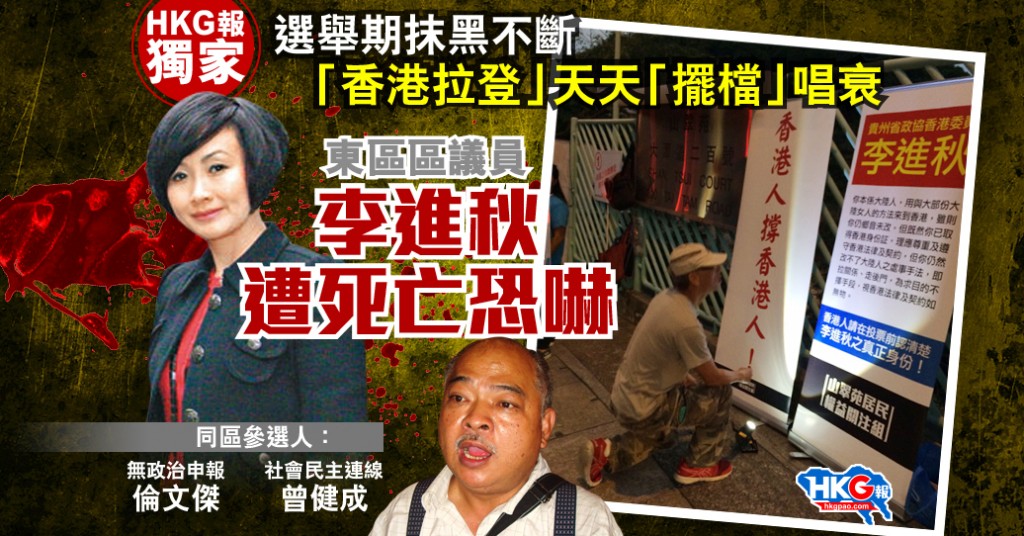
Independent incumbent Li Chun-chao
received five threatening phone calls yesterday. At around 9am, a man called
up her office to speak to her, and threatened "You won't die a good death. I
will murder you." At past 12 noon, the office received three more phone
calls. The workers got scared and did not pick up. The other party left
voice messages.
At 1:07pm, the other party
called Li's mobile phone directly to issue a threat. She recalled what the
other party said: "Li Chun-chao, you and your family members had better be
careful. Your children had better be careful, because they won't survive
past the Lunar New Year and a time to celebrate will become a time to mourn.
Do you know that last week, a woman was burned to death in Siu Sai Wan? ..."
Li Chun-chao felt threatened and called the police.
Li Chun-chao said that someone
has been launching a campaign her, including fake street posters to call for
supporting "Guizhou Provincial Communist Party Political Consultative
Conference member Li Chun-chao. Also League of Social Democrats members are
distributing modified photos of her on the Internet.
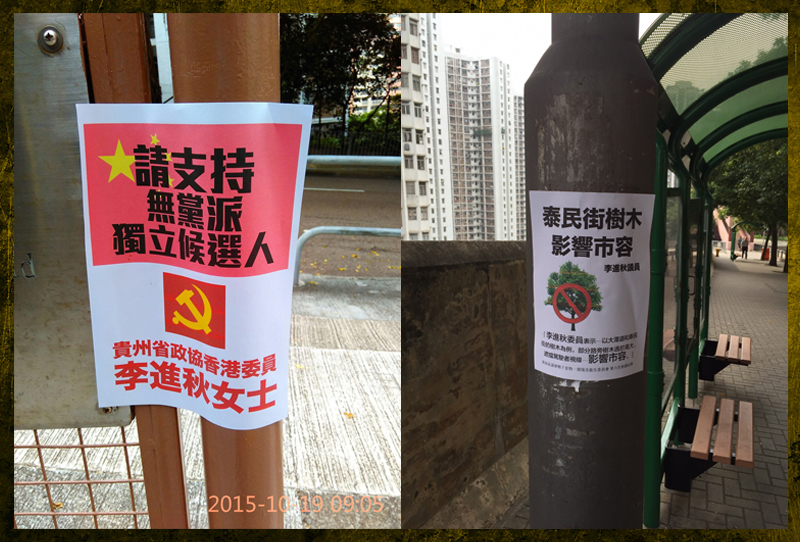
Photo (left): Please support the party-less
independent candidate Guizhou Provincial CPPCC member Li Chun-chao"
Photo (right): Councilor Li Chun-chao wants to eliminate the treets on Tai
Man Street because they are an eyesore
In addition, the person Ma
Chiu-sing (nicknamed "Hong
Kong Bin Laden") was spreading inaccurate information on Li Chun-chao
through a street booth. He even roared at one of Li's volunteers, causing
her to cry in terror.
According to Li Chun-chao,
there are two competing candidates: Tsang Kin-sing (League of Social
Democrats) and Lun Man-kit, whom she has only seen thrice before. Any
connection between Tsang and Hong Kong Bin Laden? "I cannot verify this. But
some resident said that he saw Tsang and Hong Kong Bin Laden talking to each
other before the elections."
Li Chun-chao had reported the
matter to the Independent Commission Against Corruption. She sighed:
"Districts should be electing persons who are capable and practical. Each
voter has the right to choose. I have never uttered a single bad word to
attack anyone else. I believe that I may lose the election, but I cannot
lose my integrity. However, someone keeps smearing me, including issuing
death threats. This is intoletable."
Our reporter called up Tsang
Kin-sing. He said that he has been in politics for more than two decades,
and he cannot imagine who would have such a big grudge against Li Chun-chao.
He even wondered if Li had filed a police report.

(Wen
Wei Po) November 11, 2015.
The following District Council
election candidates had been arrested during the Occupy period:
Albert Ho (Democratic Party),
Lok Tsui, Tuen Mun
James To Kun-shun (Democratic Party), James To Kun-sun, Yau Tsim Mong
Wu Chi-wai (Democratic Party), King Fu, Wong Tai Sin
Andrew Wan Chi-kin (Democratic Party), Shek Yam, Kwai Tsing
Lam Cheuk-ting (Democratic Party), Shek Wu Hui, North District
Hui Chi-chung (Democratic Party), Chung Wan, Central
Lam Lap-chi (Democratic Party), Cheung Hang, Kwai Tsing
Chan Shu-ying (Democratic Party), Siu Hong, Tuen Mun
Chan Ka-lok (Civic Party),
Southern Horizons East, Southern District
Leung Wing-man (Civic Party), Kornhill, Eastern District
Tam Chun-yin (Labour Party),
Yau Oi North, Tuen Mun
Kwok Wing-kin (Labour Party) San Fu, Tai Po
Pius Yum Kwok-tung (ADPL),
Hung Hom, Kowloon City
Gary Fan Kwok-wai (Neo
Democrats), Wan Hang, Sai Kung
Wong Ho-ming (League of Social
Democrats), Lek Yeung, Sha Tin
Tsang Kin-sing (League of Social Democrats), Lok Hong, Eastern District
Erica Yuen Me-ming (People
Power), Eastern Horizons West, Southern District
So Ho (People Power), Do Shin, Sai Kung

(Oriental
Daily) November 12, 2015.
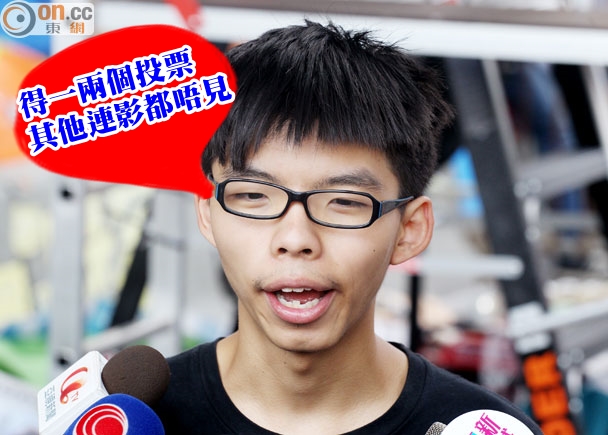
Joshua Wong posted on Facebook
that, according to the Legislative Council voting records, only a couple of
legislators from the big three pan-democratic parties (Democratic Party,
Civic Party and Labour Party) voted on the Innovation and Technology Bureau
while 13 of them who would have noted NO or ABSTAIN were absent. Wong said
that no matter whether you are going to vote AYE, NO or ABSTAIN, you as an
elected legislator needs to carry out your duty to vote. Wong asked what
mysterious reasons caused these 13 legislators to be absent "by sheer
coincidence"?
Well, this vote took place
last week and it has taken Joshua Wong almost one week to come up with an
analysis of the voting. It looks like he is really not up to speed with the
Legislative Council business, and he still thinks that he can become one of
them?
Actually, the whole world
knows why the pan-democrats were missing in action. Right now, it is less
than two weeks before the District Council elections, and the pan-democrats
can't afford to be highlighted as "filibustering" again. If Joshua Wong
really doesn't know, then he is politically naive. If Joshua Wong really
knows but pretends not to, then he is cynical (but it is also too
transparent to the point of being politically naive too).

(Wen
Wei Po) November 11, 2015.
For these District Council
elections, the pan-democrats began with their "Democracy is in danger"
emergency appeal very early on. They said that the "Umbrella Soldiers" have
parachuted into their traditional districts and take away "1/2 votes."
Interestingly, these so-called "Umbrella Soldiers" clearly have certain
objectives in picking the districts to parachute into. For example,
Youngspiration, North District Concern Group etc seemed to be picking on the
Democratic Party, Labour Party, etc candidates while clearing skipping over
the Civic Party candidates. Why?
Some people might say that
this is because the Umbrella Soldiers share the same ideas as the Civic
Party, especially with respect to the constitutional reform vote. But the
Democratic Party, ADPL, Labour Party etc voted to veto one-person-one-vote
in 2017 as well.
Actually the explanation is
very simple -- the Umbrella Soldiers and the Civic Party are closely
connected. In fact, some of the Umbrella Soldiers are the Civic Party's
B-team. This year, the Civic Party shortened their candidate list to
25 persons. They claim to be sending out only elite party members. But in
truth, they are sending out their B-team under different brand names.
Furthermore, the B-team is out there to ambush "friendlies" that they would
otherwise be too embarrassed to do openly.
(Wen
Wei Po) November 13, 2015.
A debate was held between
Yeung Hoi-wing (DAB) and Sixtus Leung Chung-hang (Youngspiration),
candidates in the Kwun Lung district, Hong Kong Island Western district.
Yeung said that the Civil Affairs Bureau is the organization supervising
building management under the law and therefore he questioned why Leung
wants to establish a "volunteer monitoring team." He said that he is neither
district councilor nor district councilor assistant and also does not have a
rich experience in politics. His "volunteer monitoring team" will have no
power, "but when something happens, they can notify the residents and the
media, and stop people from doing evil things."
Yeung asked: "So which is the
next building due to be repaired/maintained in the Kwun Lung district?"
Leung could not say. Finally Yeung has to offer a gentle reminder: "80% of
the buildings in the district have already gone through the process."

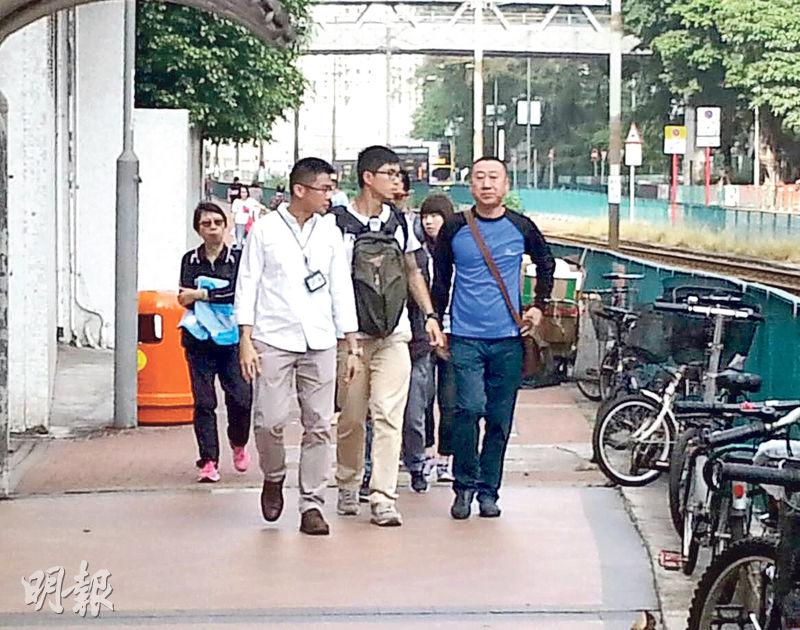
(The
Stand) November 13, 2015.
The Immigration Department
received complaints that the campaign volunteers for Junius Ho included a
putonghua-speaking mainland Chinese. Today, the Immigration Department took
this individual away. After verifying that the individual came on a two-way
visa and was not being paid for work, they released the individual.
According to Junius Ho, all
his volunteers were recommended by friends or friendly groups. This
particular volunteer was recommended by the Guangxi Association. "It was
hard to reject a friendly offer." He said that his volunteers do not receive
pay or travel reimbursements. "Not one cent."
He said that there is no
problem with mainlanders working as volunteers. "Hong Kong is a cosmopolitan
city. My understanding is that it is not against any immigration law to come
here and perform voluntary services. Many Hong Kong residents travel outside
to perform voluntary services such as Doctors Without Border, etc."
Ho said that the denunciation
probably came from a district council election opponent. "I saw that the
denunciation came from a resident named Chan. I wonder if this is just any
ordinary citizen. I believe that this came from political considerations."
Internet comments:
-
https://www.youtube.com/watch?v=b-ao2ZvYUfM Here are the volunteers
for Democratic Party candidate Louis Wong Yui-tak in the Allway district,
Tsuen Wan. In the video, a number of volunteers for various candidates are
handling out leaflets at the bus station. Wong's volunteers (1) are Falun
Gong members; (2) speak with mainland accents; (3) use foul language ("may
your whole family die"); (4) raise "I want genuine universal suffrage"
yellow banners.
-
https://www.facebook.com/badrecord/videos/1642671482675197/ Here is
another volunteer for Democratic Party candidate Louis Wong Yui-tak in the
Allway district, Tsuen Wan. There is a dispute over a certain banner and
this volunteer, who is wearing a Wong Yui-tak campaign vest, says that he
has nothing whatsoever to do with Wong Yui-tak or the Democratic Party.
(Hong
Kong Free Press) November 20, 2015.
Mainland Chinese students of the Lingnan
University have been found to have been campaigning for District Council
election candidate Junius Ho Kwan-yiu, an act that may have broken
immigration regulations. While handing out pamphlets for Ho on Thursday
morning in the Lok Tsui constituency in Tuen Mun, the three students were
approached by a reporter from Passion Times.
Passion Times is a media branch of
political group Civic Passion, which supports candidate Cheng Chung-tai of
the group, who is running in the constituency contesting Ho.
One of the students told the reporter in
Mandarin that they were mainland students from Lingnan University studying
business administration. When asked why they were campaigning for
Ho, the student replied it was because he was a governing council member
of the school. Junius Ho was appointed to the council of the Lingnan
University in October. The student added that they had been in Hong Kong
for three months.
According to immigration regulations,
however, a non-local Hong Kong university student shall not undertake any
employment, whether paid or unpaid, unless approved by the director of
immigration. However, a non-local university student whose study period is
not less than one academic year may take up an internship related to their
study or curriculum, which must be arranged or endorsed by the
institutions they are studying in.
Cheng Chung-tai told Passion Times that
he has filed a complaint with the Electoral Affairs Commission (EAC)
alleging that Ho has broken the Elections (Corrupt and Illegal Conduct)
Ordinance. Cheng said Ho was abusing his power and using his status as a
council member to recruit students to campaign for him.
In response, Ho said he and his team did
not arrange the students to become volunteers. ôI did not know the three
Lingnan University students were coming to the promotion stand before it
happened. As I understand, they knew from their friend that the actor
Jordan Chan was here today [Thursday] to campaign for me, so they
especially came to visit the celebrity and support me.ö Ho denied using
his council member status to recruit students to campaign for him, and he
deeply regretted ChengÆs ôreckless and untrueö speech. He added that he
would file a complaint to the EAC and he reserved the right to take legal
action.
Last week, a mainland Chinese volunteer
for Junius Ho was taken away for investigation by the Immigration
Department for allegedly breaking immigration regulations. The volunteer
was later released as the department confirmed he did not break any laws.
Ho told Stand News that all his volunteers were arranged by his friends or
friendly organisations and that he never participated in the recruitment
process. He said that the related volunteer was introduced to him by the
Federation of Hong Kong Guangxi Community Organisations, and he said he
cannot refuse othersÆ help. He added that volunteers do not take any
monetary rewards.

(RTHK)
November 14, 2015.
Umbrella Parents, Scholarism,
Hong Kong Federation of Students have issued a joint declaration to express
their concern over senior citizens being lured to vote for designated
candidates. According to Umbrella Parents spokesperson Wong Kit-ying, a
number of groups will send members to suspected districts on voting day to
monitor the situation. These members will bring telecommunications and video
recording equipment to make observations at senior citizen homes and voting
stations. If and when they come across large buses taking large number of
senior citizens from retirement homes to voting stations, they will make
recordings to hand over to the Independent Commission Against Corruption.
She emphasized that the purpose of the teams is to collect evidence and not
to stop the voting.
Internet comments:
- They can "occupy" all the
roads of Hong Kong so that senior citizens won't be able to vote. The only
people allowed to pass will be those who raise yellow umbrellas. Then the
Umbrella Soldiers will win for sure.
- Many senior citizens who
live in retirement homes may not be mobile and cannot walk down to the
one voting station in the district. Therefore, it is reasonable for the
retirement home to hire a bus to transport those senior citizens who wish to
vote. If in each such case, the Independent Commission Against Corruption is
going to act on the complaints and send investigators to cross-examine each ad
every senior citizen about their voting intentions, then this is highly
intrusive and vexing. This is just designed to intimidate senior citizens to
refrain from voting.
- If an ICAC investigator
shows up to question me about how I voted, I would have said that the vote
was by secret balloting and I don't have to say a thing. So get lost!
- I remember that when
Scholarism and Federation of Students occupied the streets of Hong Kong,
they said that all the people in Hong Kong support them. So now they lack
confidence about what some of the people might do at the voting booths.
Therefore they are resorting to voter suppression tactics.
- (Wikipedia)
Voter suppression
Voter suppression is a strategy to
influence the outcome of an election by discouraging or preventing people
from exercising the right to vote. It is distinguished from political
campaigning in that campaigning attempts to influence likely voting behavior
by changing the opinions of potential voters through persuasion and
organization. Voter suppression instead attempts to reduce the number of
voters who might vote against the candidate or proposition advocated by
the suppressors.
The tactics of voter suppression can
range from minor "dirty tricks" that make voting inconvenient, up to
blatantly illegal activities that physically intimidate prospective voters
to prevent them from casting ballots. Voter suppression could be
particularly effective if a significant amount of voters are intimidated
individually because the voter might not consider his or her single vote
important.
Related link: (New
York Times) Looking, Very Closely, for Voter Fraud. September 17,
2012.
- Busing people is bribery? Well, here is a
case of a busload of 9wu (=Shopping Revolutionar) regular uncles and
aunties getting on a bus to visit some of the other regulars who are running
in the District Council elections. Who is paying for this Magical Mystery
Bus Tour? Whose election expenses will this show up under?
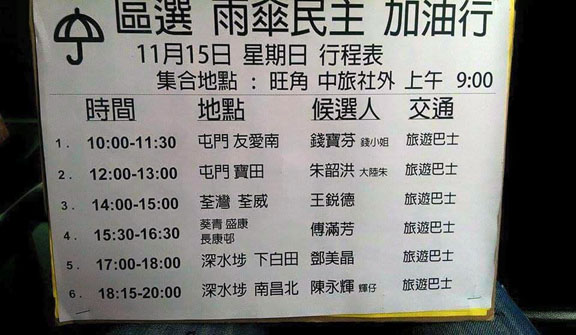
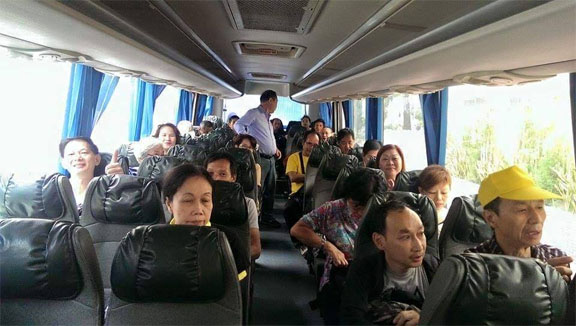
SocRec video:
https://www.youtube.com/watch?v=4VLx3Vu_4IA

(Oriental
Daily) November 16, 2015.
Power for Democracy held a
press conference yesterday. Convener Andrew Chiu and representatives from
the 18 districts applied orange spray paint to a red-colored map to imply
that they intend to stop the "red"-ification of Hong Kong. Unfortunately,
they forgot to open the windows for ventilation. After the paint spray was
used, most of those present felt uncomfortable and left quickly. Do they
plan to use poison gas warfare against the Communists?
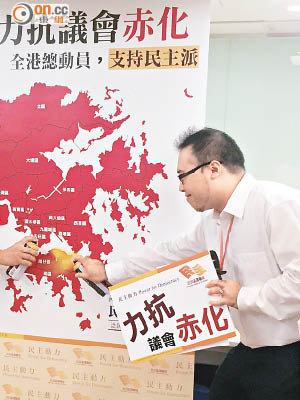

(Hong
Kong Free Press) November 17, 2015.
Non-profit chain store Home Market has been
accused of canvassing support for pro-government candidates in the upcoming
district council elections. Kwai Tsing district councillor Chow Wai-hung
told HKFP that the retailer has recruited supporters for pro-government
candidates among its members through the New Home Association, which the
councillor says is affiliated with Home Market, a claim the chain denies.
The Association has held classes for Home
Market members and asked them to volunteer for pro-establishment candidatesÆ
campaigns, according to Chow. The store chain also put up campaign posters
for these candidates and held promotional activities at the front of stores,
Chow added. ôA non-profit organisation being involved in such high-profile
political activities? I donÆt think it is reasonable.ö Chow, a member of the
pan-democrat Neighbourhood and WorkerÆs Service Centre, is running for
re-election in SundayÆs polls. He is competing against Mo Sang-tung of the
DAB, independent candidate Leung Kwong-cheong and Chan Yuk-ling.
A spokesperson for Home Market told HKFP
the chain is not affiliated with the New Home Association. ôThe New Home
Association and Home Market are two separate organisations.ö However, the
spokesperson did confirm that posters promoting pro-establishment candidates
had been placed in Home Market stores.
Chow also said the retailer was involved in
anti-Occupy Central activities and helped the government promote its
political reform bill. ôThey even gathered signatures to support political
reform,ö Chow said.
Home Market sells daily products ôat near
wholesale pricesö to ôhelp grass-roots customers save moneyö, its website
says. A 330 ml Coca Cola can sells for HK$3.5 to non-members and HK$2.7 to
members, which is considerably cheaper than the price in Wellcome and
ParknShop. The two supermarket giants both offer a four-can pack of the same
soda for HK$18.9, which means one can costs around HK$4.7.
Home Market was founded in 2012 by Peter
Lee Ka-kit, son of property tycoon Lee Shau-kee. It is funded by the Lee
Shau Kee Foundation. The retail chain boasts more than 100,000 members and
has eight branches in Kowloon. According to its website, only five groups of
less privileged people are eligible to become members of Home Market. They
include elderly permanent Hong Kong residents over the age of 65, disabled
people, low-income families, minorities and new immigrants from mainland
China. To apply for membership, applicants have to provide relevant
identification documents.
According to an official press release,
Home Market is included in the governmentÆs ôAppreciate Hong Kongö campaign.

(Ta
Kung Pao) November 19, 2015.
At 2:13am on November 17, an
Internet user named Natalia Chung posted a photo of Siu Hong district
candidate Mo Shing-fung and his family and said: "Do you want to know the
story of the various members of this family?" Next Natalia Chung drew black
lines across the eyes of the people in the photo because "using the black
lines" means that there is no invasion of privacy. Natalia Chung posted a
link that is supposed to be the source of the photo, but the link doesn't
work. Meanwhile another Internet user named "Do not cooperate" wrote:
"Showing the photo doesn't mean anything. You cannot say that showing the
photo means that you want to kill his entire family. Why can't we just be
caring about his family?"
Yesterday Mo Shing-fung filed
a police report. Natalia Chung responded by calling on Internet users to
"actively comfort him." Mo told our newspaper that the photo was taken at
his birthday early this year. He does not know how Natalia Chung got this
photo. Mo said: "Although I expect to be attacked for entering the election,
this is my personal decision and should not have hurt my family."
Mo also said that a
60-something-year old volunteer of his was threatened by a fat man who
promised to "beat him up everything he sees him around." Mo and the
volunteer have filed a police report.
Mo Shing-fung is the community
director for the DAB in the Siu Hong district, Tuen Mun. Over the past four
years, he has been introducing new activities such as distributing bonsai
plants, book exchanges, etc. Ever since the ran and lost in the last
district election, he has been attacked by Internet users Natalia Chung, "Do
not cooperate" and others on the Internet. But this was the first time that
his family has been brought into this. According to Internet information,
Natalia Chung and "Do not cooperate" are members of Internet groups such as
"Is Hong Kong independence feasible?" "Self-determination of fate" "Oppose
red-ification, oppose colonization" etc, as well as being pro-Occupy
Central.
Mo is running against
Democratic Party incumbent councilor Josephine Chan Shu-ying.

(Apple
Daily) November 20, 2015.
Hung Hom district incumbent
councilor Pius Yum Kwok-tung (ADPL) found two men distributing leaflets in
the street, one of them wearing dark glasses and surgical mask. The leaflet
says "Don't forget the hurt from Occupy Central" and "Lawless ADPL occupied
Central." Yum began filming them whereupon one of them yelled at him: "Fuck
your mother! You fucking stupid moron!" Yum suspects the two men of
violating the election regulations, and has filed complaints with the police
and the Independent Commission Against Corruption.
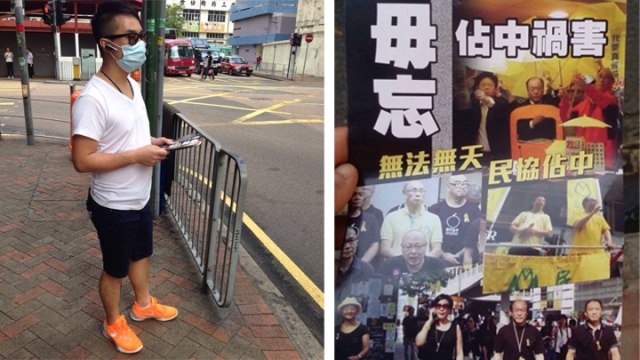
- Alliance for Peace and
Democracy poster about "Do not forget the harm from Occupy Central, be wary of
the disturbances returning again."
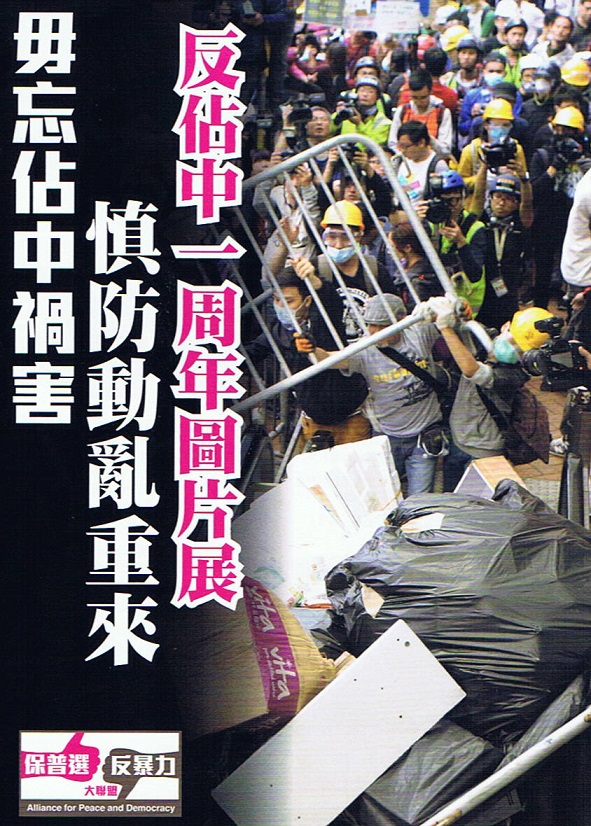
Internet comments:
- If Yum Kwok-tung is upset with
being cursed out in obscene language, then how does he fell about the Lingnan
University students? (see #368).
- But this leaflet is merely stating the
fact that ADPL supported Occupy Central. So why is this a smear?

(Wen
Wei Po) November 21, 2015.
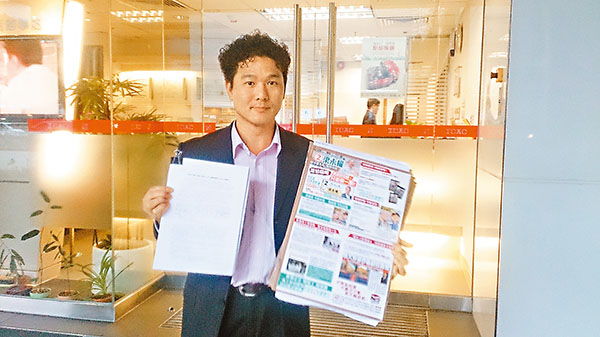
On November 19, Leung Wing-kuen
(Democratic Party) inserted leaflets into every mailbox in On Yam district,
Kwai Ching. These leaflets accused Dennis Leung Tsz-wing (Federation of
Trade Unions) of vote-buying, seeding votes, stealing votes, using a false
resumÚ, oppressing working-class people, etc. Yesterday Leung Tsz-wing went
to file a complaint at the Independent Commission Against Corruption. He
said that the leaflets were inaccurate and misleading, and were intended to
smear him to sway the voters.
Previously this newspaper had
reported that Leung Wing-kuen and Kwai Chung district councilor Andrew Wan
of the Democratic Party distributed 5,000 packets of rice two days before
the nomination for district councilor began.

(Wen
Wei Po) November 21, 2015.
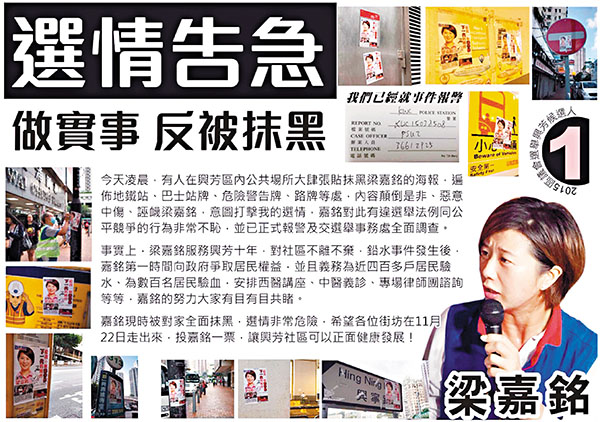
Outside the Kwai Fong MTR
station, there were a large number of posters which appear to be campaign
posters for candidate Leung Kar-ming (DAB). Upon closer reading, they are
actually smear jobs. The poster has the photo of Leung Kar-ming, with the
candidate number and DAB party identification. But slogan used was "Give me
a chance to poison your children." The poster also quoted negative reporting
by Next Magazine on Leung about lead-in-water. These posters appear on bus
stops and street signs. Leung's opponent is Democratic Party incumbent
councilor Ng Kim-sing.

(Wen
Wei Po) November 21, 2015.
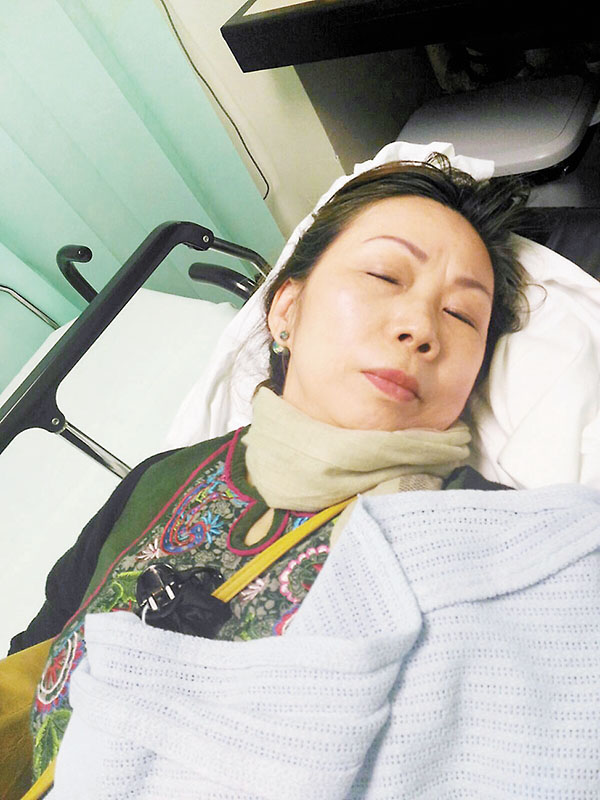
Yesterday at around 530pm,
Mrs. Chung Shu-kun and an assistant were handling materials for the street
booth in her husband's Yue Wan office in preparation of holding the street
booth late. A young man in a black t-shirt and a backpack entered. He said
that he was a reporter who wanted to interview Chung Shu-kun. But Mrs. Chung
recognized him as a campaign member of Chung's rival Chui Chi-kin. The young
man denied that and said that he had a press pass. Mrs. Chung asked to see
it again and again but the young man refused to show it. The young man tried
to flee. Mrs. Chung and a female assistant gave chased. Mrs. Chung fell down
with head and neck injuries. The female assistant stopped the young man and
called the police for help.
After the young man was
arrested, he immediately called Chui's campaign team for help. Chui's team
member rushed over. A female team member kept taking video with her mobile
phone. When the police asked why and what she was filming, she ignored them.
The police asked her if she witnessed the incident and she was tongue-tied.
Several days ago, a man ripped
off the posters outside Chung's office and aimed spray paint at the workers
inside the office. At the time, Mrs. Chung was doing inventory in the
office. Her hair was sprayed with paint. A security guard who tried to stop
the man was injured by the man. The police had to come over.
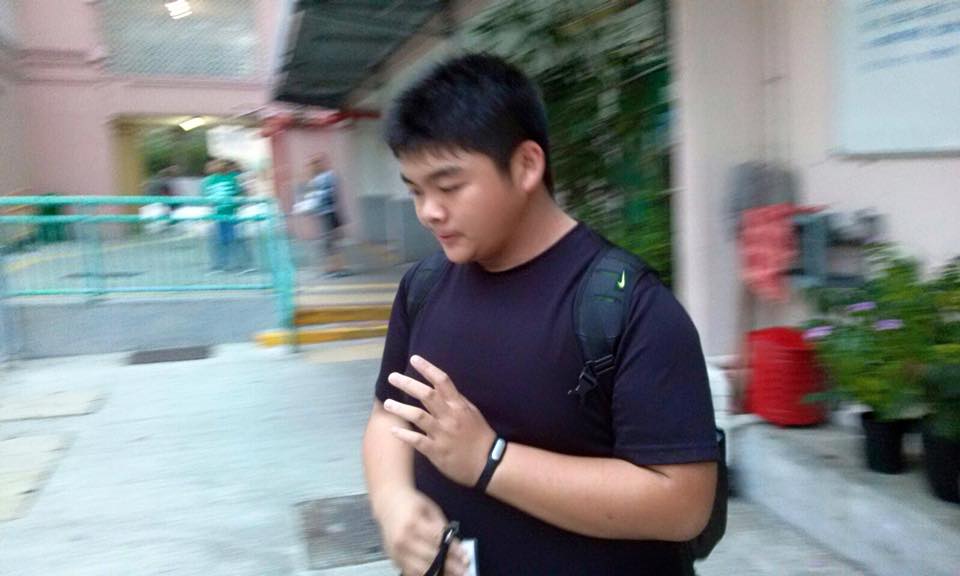
Young man who claimed to be a reporter
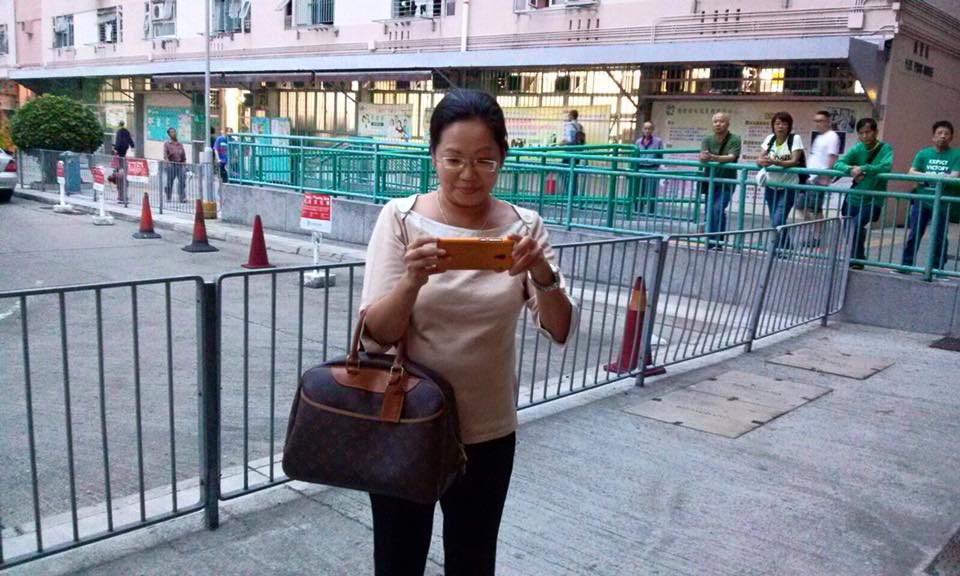
Chui Chi-kin's campaign team member came over
to gloat over Mrs. Chung
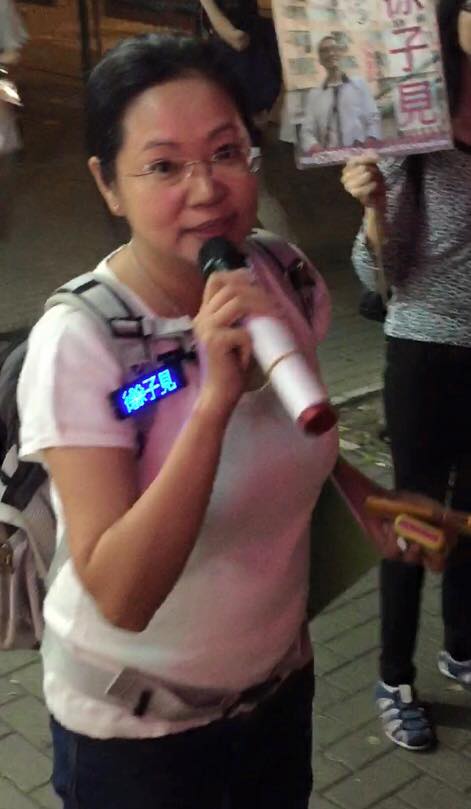
The same woman over at Chui's street booth
wearing a badge with the name "Chui Chi-kin."
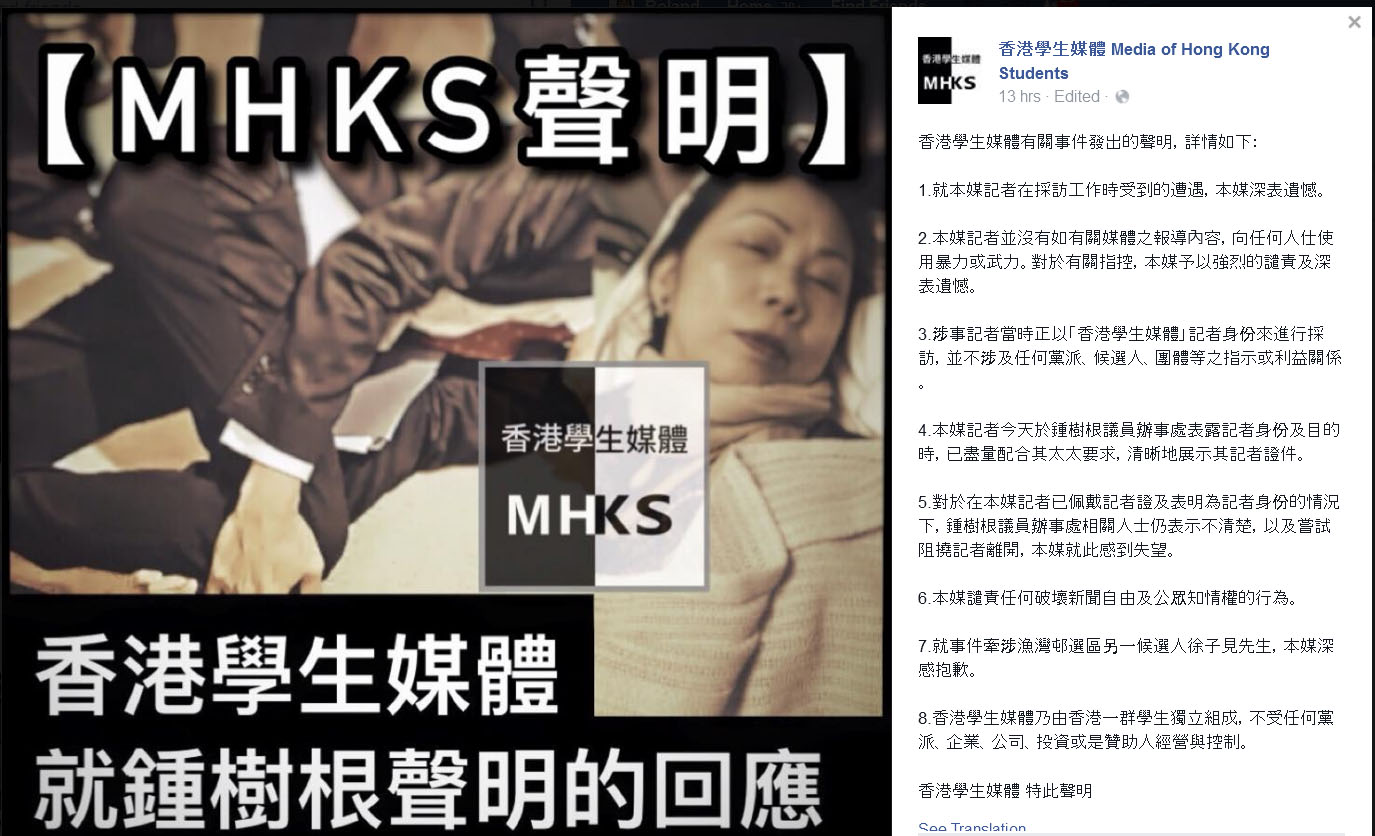
Media of Hong Kong Students
statement:
1. We express our deep regrets
about what our reporter encountered during the process of gathering news
2. Our reporter did not use
any violence or force as reported by certain media. We express our strongest
condemnation and deepest regret about those allegations.
3. The reporter was gathering
news as a reporter of Media of Hong Kong Students, without any orders or
interests connected to any political party, candidate or group.
4. Our reporter identified
himself as a reporter and stated his purpose at the office of councilor
Chung Shu-kun. He cooperated with Mrs. Chung's request and clearly displayed
his reporter's identification.
5. However, the persons at
councilor Chung Shu-kun's office were unclear about the reporter badge and
his identify and tried to prevent our reporter from departing. We are
disappointed about this.
6. We condemn any acts that
disrupt freedom of press and the public's right to know.
(Wen
Wei Po) November 22, 2015.
After the unlawful Occupy
Movement failed, a group of Umbrella Soldiers entered the district council
elections in order to bring in the lawless spirit of Occupy to attack the
pro-establishment candidates. In Yue Wan, Hong Kong Island Eastern District,
a member of the umbrella soldier candidate Chui Chi-kin entered the office
of DAB candidate Chung Shu-kun and injured Mrs. Chung.
Afterwards, Media of Hong Kong
Students claimed that the young man is a "reporter" who had shown his "press
card". But there is a video from the closed circuit television in Chung's
office
https://youtu.be/joRj5UYCyh4
showing that the young man had only flashed a card-like object. Mrs. Chung
could not seen what was on the object, and so she approached him from the
rear of the office. But upon further questioning, the young man fled. This
young man is surely not any 'reporter.' Mrs. Chung and another female
assistant chased him.
According to the police, the
young man has been arrested and is now out on bail.
After the video was published,
Chui Chi-kin said on social media that the matter is in the hands of the
police and he himself is not familiar with the details of the incident.
However, he did admit that the young was one of his campaign volunteers
distributing leaflets. He said that the young man was a Form 4 student who
was gathering news for his own student newspaper. He said that he was
surprised but, as an adult, "I personally trust students and believe that
they should be protected." Therefore, "our volunteer team is seeking help
for that student."
Video:
(Now TV)
http://news.now.com/home/local/player?newsId=158826 News report
Internet comments:
- Apparently any Joe off the
street can become a reporter. I think I will go and start a "Hong Kong
Students Media" Facebook, make up and print some reporter badges and then I
will be reporter who is fully licensed to roam anywhere I want to "gather
news." Anyone who stops me is violating freedom of press.
- What the hell is the Media
of Hong Kong Students? I have never heard of them. I went over to their
Facebook and all they carry is news about English Premier League soccer
games. Any fucking guy can maintain this media outlet just by checking some
sports news websites. Is the English Premier League the only thing that Hong
Kong students are interested in?
- One day, you are a campaign
worker handing out leaflets. The next day, you are a reporter without any
orders or interests connected to any political party, candidate or group.
- On Mondays through Fridays, I go to work as a Buildings Department senior
managing director. On Saturdays and Sundays, I moonlight as consultant to
Sun Hung Kai Properties. I see no conflict of interests because I manage to
compartmentalize myself.
- To quote Hong Kong
University Students' Union president Billy Fung, this is a case of "以武制暴"
(=using violence to halt tyranny). Chung Shu-kun is with the
pro-establishment DAB party. Therefore it is right and just to beat his wife
up. PERIOD.
- The initial release from
Media of Hong Kong Students was this:
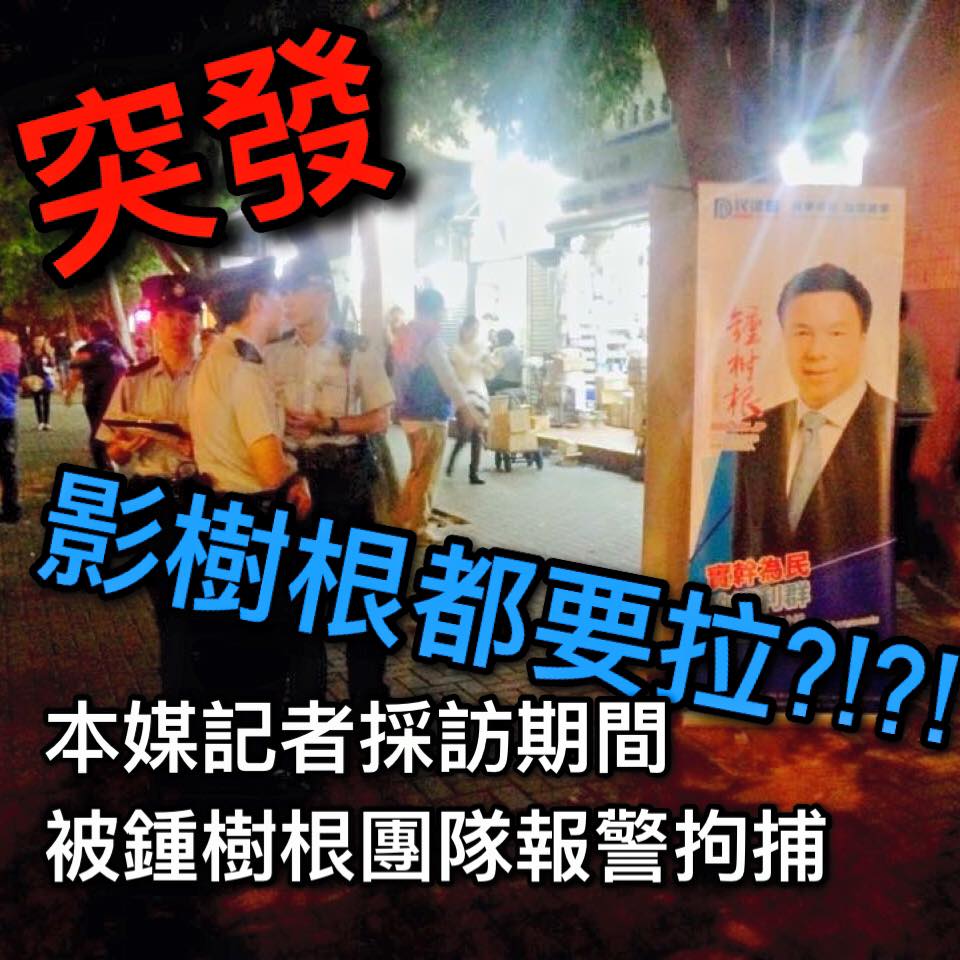
Breaking News:
Does taking photos of Chung Shu-kun lead to arrest?!?!
Our reporter was arrested by the police after the Chung Shu-kun campaign
team reported him.

(YouTube)
November 21, 2015.
Defend Hong Kong Movement
members were distributing leaflets in Sai Wan Ho when they encountered a
pro-Hong Kong independence thug who tossed a ton of obscenities at them.

(Apple
Daily) November 22, 2015.
At 749am in the To Kwa Wan
North district, candidate Lam Yi-lai reported being assaulted by a man at
the corner of To Kwa Wan Road and Lok Shan Road. Lam said that DAB candidate
Starry Lee Wai-king's volunteers prevented her volunteers from distributing
leaflets. Lam used her mobile phone to film the other side. But a
76-year-old DAB volunteer used a handful of leaflets to slap her hand and
phone. "He kept hitting me." Therefore Lam had to call the police.
Based upon the video the old
man said that other people were not allowed to pass out leaflets there. Then
he got upset by the filming and shouted "What are you filming!" Then he
struck Lam's mobile phone six times. The old man said: "You don't have our
consent to film us."
(INT News Channel)
https://www.youtube.com/watch?v=vf4pphaxigw Video provided by Lam
Yi-lai.

(EJinsight)
November 23, 2015.
Hong
Kong election authorities received more than 2,400 complaints relating to
SundayÆs district polls. These included hundreds of elderly people being
brought to polling stations and coached which candidate to vote, according
to Ming Pao Daily. Altogether, the Registration and Electoral Office
collected 2,429 complaints.
Chan
Wai-kin of the Progressive TeachersÆ Alliance said he saw seniors being
bussed to polling stations in vans, some wearing the No. 1 badge, suggesting
they had pre-selected a particular candidate.
Kwok Fu-yung of the
pro-establishment Democratic Alliance for the Betterment and Progress of
Hong Kong (DAB) was candidate No. 1 in the Tai Pak Tin constituency in Kwai
Tsing district. She won with 2,880 votes, beating
incumbent Sammy Tsui of the Democratic Party who had the 1,997 votes.
Electoral Affairs Commission chairman
Barnabas Fung said if the free rides came with conditions, these would be in
breach of the election ordinance. The maximum penalty is a jail term of
seven years and a fine of HK$500,000 (US$64,513).
Chan said the escort services were highly
organized. Some of the mainly Putonghua-speaking members prevented people
from taking pictures of the activity. He said more than 30 seniors were
driven to polling stations during the five hours he observed the operation.
Chan said he overheard them being told they would be brought to a Chinese
restaurant for a meal afterwards. DABÆs
Kwok said she had no idea of any such activity.
Meanwhile, nowTV reported that some elderly
voters in Siu Sai Wan constituency were escorting fellow seniors in and out
of polling stations and slipping notes with ôNo. 2″ on them.
Chu Yat-on, candidate No. 2 in the district,
denied any knowledge of the alleged incident.
In Tuen
Mun, a Cable TV news crew said they saw staff of Kwong Fuk Elderly Care
Center taking seniors to vote, uttering ôNo. 3, No.3ö as they walked into
the polling station in groups.
Non-partisan candidate Kwu Hon-keung said he never arranged for residents of
elderly homes to vote for him.
(Hong
Kong Free Press) November 23, 2015.
Local media outlets have highlighted
multiple instances elderly voters being shuttled to polling
stations during this yearÆs District Council Elections, raising concerns
over potential vote rigging. On Sunday morning, not long after voting began,
a tour bus full of senior citizens stopped outside a polling station in Lek
Yuen, Sha Tin, according to InMedia. Later in Tuen Mun, elderly voters were
seen being led to vote by care centre staff, i-Cable News reported. The
staff reportedly reminded them of which candidate to vote for.
In Hung Hom, a van with both Hong Kong and
mainland Chinese number plates was spotted shuttling senior voters to a
polling station multiple times. When questioned by an Apple Daily reporter,
the driver said the old people were ôall his parents.ö Similar incidents
have been reported in past elections with mostly candidates from the
pro-government side being accused of organising elderly voters.
The Electoral Affairs Commission received
over 2,400 complaints on Sunday, mostly concerning campaign
advertisements. Chairman of the EAC, Barnabus Fung said a vote rigging
offence cannot be established unless elders were proven to have been forced
or bribed to vote for a candidate.
(SCMP)
November 23, 2015.
Coaches and cars were out to ferry elderly
voters to polling stations yesterday as speculation mounted that several
candidates in the pro-Beijing camp had arranged free rides for elderly
residents of homes for the aged and from rural villages. They were also
allegedly told whom to back in the district council elections.
A South China Morning Post check
found at least eight elderly residents of Kam Ma Home of Aged in Hung Hom
taken in the same van in two rounds to the voting station in Hung Hom
Municipal Services Building around 3 pm yesterday.
Incidents of voter-ferrying were also
witnessed in Mei Foo North constituency and Pat Heung South in Yuen Long. In
the latter district, cars arriving at the polling station at regular
intervals to drop off voters, many of them elderly, was observed from 2.30
pm to 7 pm.
At the Hung Hom polling station, the senior
citizens were escorted by two women who claimed to be ôvolunteersö. One man,
who was stationed near the home, was seen holding what appeared to be a list
of voters staying there and another was seen giving each elderly person
their identity card before they entered the polling station. One of the men
was later seen in the nearby office of the Democratic Alliance for the
Betterment and Progress of Hong Kong. The partyÆs candidate in Hung Hom
constituency is Daniel Lam Tak-shing, who is running against incumbent
pan-democratic councillor Pius Yum Kwok-tung and independent Wong Chi-keung.
An old lady, when asked whom she had voted
for, said: ôI have forgotten. I donÆt know anyone.ö Another resident said:
ôThey will teach us whom to vote for when we get upstairs.ö When approached,
the escorts denied they were acting on the orders of any candidate and said
they were merely volunteers helping elderly people cast their votes.
A caretaker in Kam Ma Home of Aged admitted
that some of their residents were taken to the polling station by
volunteers. When asked why a third party had got hold of the residentsÆ
identity cards, she only said they would not allow the residents to keep
them and refused to take further questions.
In September, the
Post reported that a
caretaker at the home revealed that Lam had been giving out free gifts to
the senior residents almost every month and had encouraged them to register
as voters. He had also allegedly suggested arranging coaches to send
disabled people to the station on polling day. Lam yesterday refused to
respond to the allegations even after being pursued for several blocks.
Electoral Affairs Commission chairman Mr
Justice Barnabas Fung Wah yesterday said offering any benefits û including
transport services û to induce people to vote, not to vote or whom to vote
for a particular candidate was illegal.
Dr Wong Hung, a social work scholar in
Chinese University, said elderly people's voting right should be respected
even they were disabled but the ballots they cast must reflect their own
will. "If they actually do not know who to vote or apparently being
manipulated, then it is definitely undesirable," he said. "Would these
senior residents receive worse service in the care centre if they do not
vote?" Wong also pressed on the elderly home to explain why it would pass
the identity cards of the residents - which should be kept by the elderly
people themselves - to a third party.

(Hong
Kong Free Press) November 27, 2015
A week ago, the constituency of Shau Kei
Wan, a neighbourhood in the East of Hong Kong Island with some 13,000
residents, represented a potential problem for the pro-establishment
Democratic Alliance for the Betterment and Progress of Hong Kong (DAB).
The DABÆs incumbent district councillor Lo
Tip-chun had held the seat since 1994. She had run unopposed until 2007,
when she defeated an independent candidate by a margin of 523 votes. Four
years later, the gap had narrowed to 153. This year, she nominated her
protÚgÚ Lam Sum-lim, who was challenged by local secondary school teacher
Jenny Leung. It was poised to be a tight election.
Enter a third candidate: Vannie Poon.
PoonÆs election flyers called for ôreal universal suffrageö and bore the
yellow ribbon, a symbol of the Umbrella Movement. Yet that is essentially
all we know about Poon. She has never given an interview. The Facebook
account printed on her flyers is private. The flyers contain the phrase
ôShau Kei Wan Democratic Concernö, strangely similar in Chinese to LeungÆs
ôShau Kei Wan Livelihood Concern Groupö.
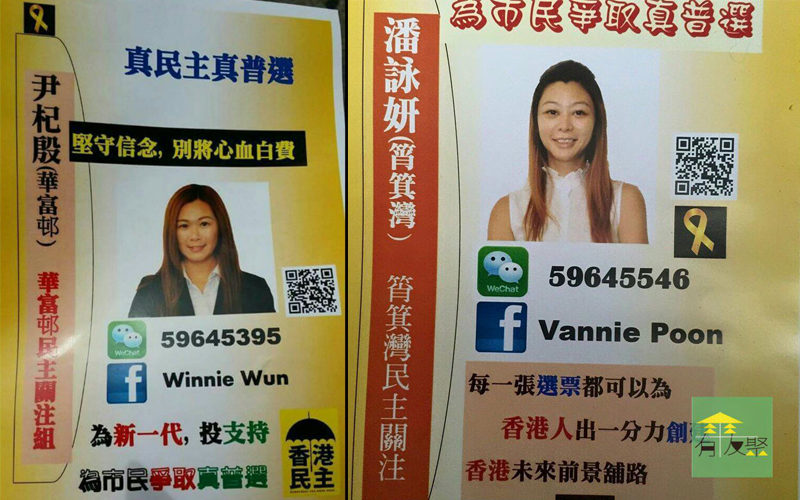
Last Sunday Poon received a paltry 107
votes. But had Poon not run in Shau Kei Wan, these votes might û or might
not û have gone to Jenny Leung, who ultimately lost to the DABÆs Lam Sum-lim
by a mere 15 votes.
The New Youth Group
Poon is one of several people alleged to be
associated with the mysterious New Youth Group (NYG). In October,
spokesperson Li Chak-sum claimed that the group would field eight candidates
in the District Council elections. This claim cannot be verified, however,
because no candidates have officially declared themselves to be affiliated
with the NYG with the Electoral Affairs Commission. Li has also refused to
disclose their names.
The suspected NYG candidates ran in
constituencies contested by at least one pan-democrat and one
pro-establishment candidate, often where results in 2011 were close. They
shared similarly-designed flyers donned with yellow ribbons. Several
provided the same contact number.
Among them, Daniel Lau received 94 votes in
Southern DistrictÆs Wah Kwai constituency, where the Democratic PartyÆs
Yeung Siu-pik lost to the DABÆs Ada Mak-Tse by only 47. Like Vannie Poon,
Lau received a greater number of votes than the margin by which the local
pan-democrat lost. Stand News therefore concluded that the NYG had succeeded
in tilting the election in favour of the pro-establishment candidates in at
least two constituencies.
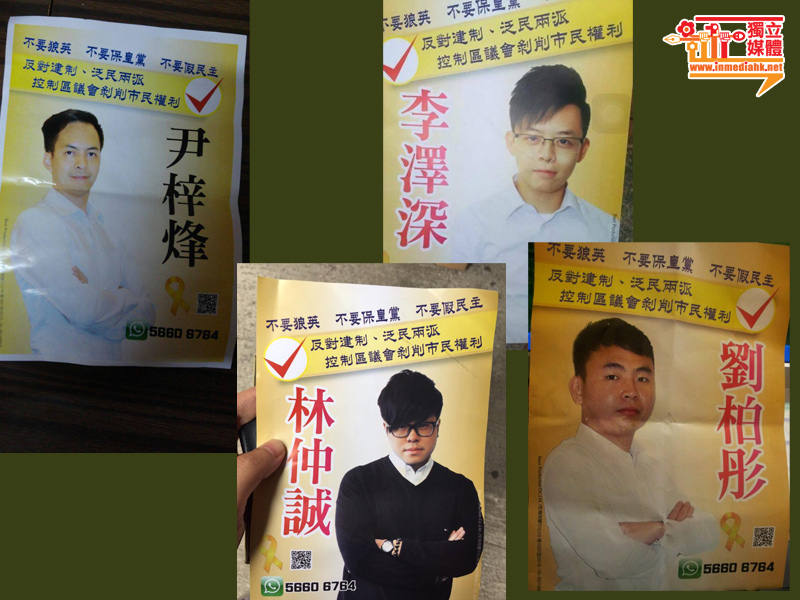
As such, they have been accused by netizens
of being ôfake umbrella soldiersö: operatives from the pro-establishment
camp who aim to dilute the pan-democrat vote by running on a similar
electoral platform.
There is certainly some suggestion that
this is the case. In October, Next Magazine succeeded in speaking to Li Chak-sumÆs
grandmother, who claimed that he was politically apathetic, but ôreceived
around HK$10,000 per month for handing out pamphletsö. The Democratic and
Civic parties then lodged a complaint against him with the Independent
Commission Against Corruption, though it appears no action has yet been
taken.
Just this week, former League of Social
Democrats member Remzi Wu disclosed to Stand News that he had been requested
by ôsomeone in the pro-establishment campö to run in Tai Hang, Wanchai. Also
contesting in Tai Hang was Clarisse Yeung from Good Day Wanchai, a
post-Umbrella Movement group. Wu refused this request.
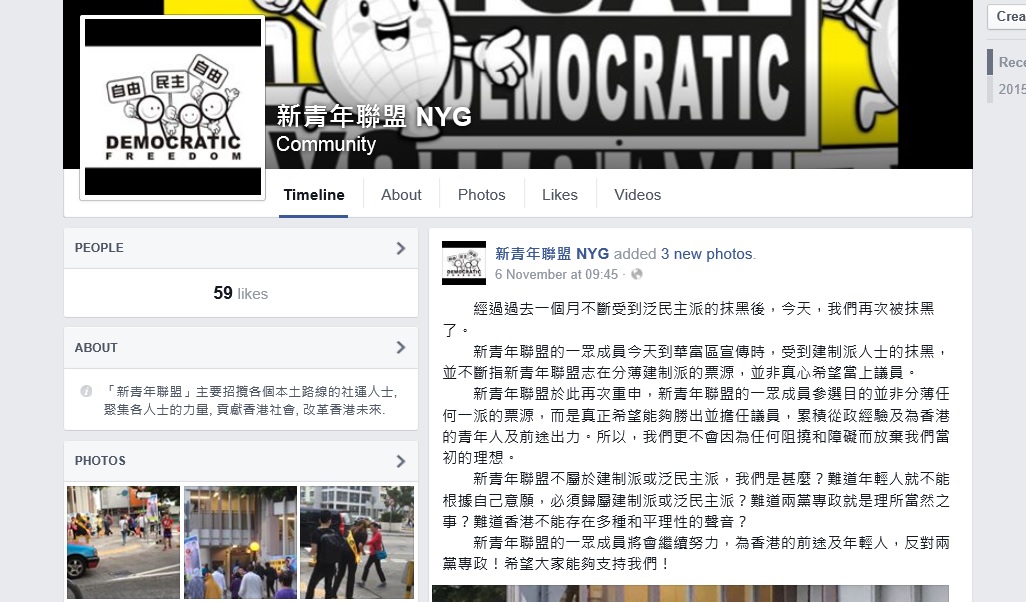
Not Very Creative After All?
Among the various allegations of (legal or
illegal) electoral fraud in Hong Kong, the practice of ôvote-snatchingö
using fake candidates certainly stands out, having received unprecedented
media attention. It is not part of traditional repertoire, such as
recruiting elderly voters from retirement homes, or providing material
benefits. But it would be wrong to believe that we are witnessing anything
new or particularly innovative.
In 2011, Russell Pearce, the Arizona State
senator for the district of Mesa West, was presented with 18,000 ôrecallö
signatures from disgruntled citizens, forcing new elections to be held for
his district. It was expected that Pearce, known for his anti-immigration
policies, would lose much of the Mexican-American vote to his challenger.
Out of nowhere, a retired semiconductor worker of Mexican origin named
Olivia Cortes entered her candidacy, appealing to Spanish-speaking voters
with the slogan ôSi Se Puede!ö (Yes We Can). Although she eventually
withdrew, citizens filed a lawsuit against Cortes û alongside several
members of PearceÆs entourage û for attempting to deceive voters.
A New York Times feature on electoral fraud
from 2004 documented deception techniques that seem even more bizarre. That
year, a former dockworker named Jose Serrano was asked to run against
incumbent Congressman JosÚ E. Serrano, allegedly to confuse his voters for
the benefit of a third candidate. The previous year, John C. Liu ran against
Jay C. Liu for a seat in the New York City Council.
Implications for the Electoral
System
This practice poses a problem for the
democratic system. In an election with many constituencies, it is
unrealistic to expect the media to spend so much time and effort on exposing
the background and intentions of every newcomer candidate. So how do you
design an election, so as to prevent Party A from sending out a fake third
ôIndependent Candidateö C, with the exact same electoral programme as Party
B, in order to dilute Party BÆs votes?
- Perhaps the masterminds behind the ôfake
umbrella soldiersö û if the accusations are true û were incentivised by
low nomination barriers. According to the Electoral Affairs Commission,
candidates need only receive nominations from 10 registered voters and pay
a deposit of HK$3,000 to run for the District Council. However, raising
the nomination barriers would risk excluding genuine candidates without
financial backing. The non-affiliated Chui Chi-kin might have thought
twice before deciding to run against û and eventually defeating û
legislator Christopher Chung Shu-kun on nomination deadline day.
- To limit the number of candidates, we
could also introduce a second round of voting. The two candidates with the
highest number of votes in the first round would progress to a run-off
election, and electors would be asked to choose one or the other. However,
it is a massive strain on societal resources to implement this system in
hundreds of constituencies.
- Perhaps the answer lies not in the
design of the election, but in better enforcement by the authorities
against ôfake candidatesö. But like any fraud case in court, this could
take months or years to prove. If the authorities were to vigorously
investigate every allegation, Party B might be encouraged to make
frivolous complaints against Party A and Candidate C, in order to disrupt
both their campaigns. Running in an already-crowded constituency in order
to dilute votes is not necessarily fraud; some localist candidates have
adopted this strategy to oust moderate pan-democrats.
Of course, not all attempts at voter
dilution are effective. Theoretically, the unknown Candidate C would only be
able to ôsnatchö a significant number of votes from Party B if the latterÆs
electorate were divided on certain issues and/or dissatisfied with the
status quo. But this is exactly the case in Hong Kong after the Umbrella
Movement, where some believe that the traditional pan-democrats are no
longer appropriate spokespeople for the cityÆs democratic movement.
It appears, therefore, that there might not
be any immediate solution. Interviewed by RTHK the morning after the
elections, Sung Lap-kung, a political analyst at City University, forecasted
that ôvote-snatchingö would become a regular strategy in the future.

(Next Weekly) December 3, 2015.
A resident in Tin Shui Wai said that he
received a notice from the post office to pick up a registered letter. When he
got there, he was told that the letter did not have enough postage so he'll
have to go to Yuen Long to pay the difference. This occurred on Saturday and
the post office was closed for the rest of the day. So on Monday, he skipped
work and went to Yuen Long. He opened the letter and saw that it was a
reminder to vote for a certain candidate in the district elections. This
caused him to get very angry. "If I support you, I would certainly vote for
you. You didn't have to send me a registered letter without sufficient
postage."
However, given that certain basic information
were incorrect (such as listing the DAB candidate as an FTU candidate), it is
not clear if the candidate sent the mail, or if this was a piece of sabotage
by an opponent.
(Next Weekly) December 3, 2015.
The Next Weekly reporter went around to
various quarters for the Disciplinary Forces and found a common feature --
there were copies of Ta Kung Pao, Wen Wei Po, Headline Daily and Sky Post
being distributed for free in order to "brainwash" the various Disciplinary
Forces members and their families to vote accordingly.
Internet comment:
- What kind of simple, naive Yellow Umbrella
reporters do we have nowadays? Giving away a few free newspapers is going to
brainwash people into voting a certain way? Well, those newspapers are given
out for free elsewhere in Hong Kong too. So why weren't the rest of the
population brainwashed as well? The crux of the question is this: Why did the
free newspapers work particularly well in the Disciplinary Forces quarters?
Hint: Nobody likes to be called "Black/Evil Police."

(Apple
Daily) December 11, 2015.
Lam Tin candidate Yau Mei-po was the
shipping/warehouse manager for Kwong Tat Enterprises Limited earning more
than $40,000 per month. Her boss is Bernie Ting, the chairman of the Hong
Kong Q-Mark Scheme. In the election, Yau obtained just over 1,200 votes and
lost to the FTU candidate who got more than 3,200 votes.
In November, Ting learned that Yau was
running for election and told her: "I want to terminate our employment
relationship. What do you think?" Ting also gave her a resignation letter,
but Yau refused to sign it. Ting said that if Yau would be dismissed if she
refused to sign and he wanted her to decide immediately. Yau signed the
letter of resignation because she needed a letter of reference to find
another job.
Yau has been working there for more than
ten years. She asked Ting whether she will receive the $130,000+ for
long-term employment service. At the time, Ting said, "Yes, yes, yes." In
addition, Ting did not tell her why he wanted to terminate her employment.
Only after Yau did Ting say that she was late on many occasions. Yau said:
"He never gave me any warning letters. I work overtime without pay, and how
does that count?" She also said that she has never made any mistakes in
logistics management.
Today Yau contacted the human resources
manager and was told that there would be long-term employment service
payment because "you resign on your own." Yau said the long-term employment
service payment comes out of the mandatory provident fund offset and costs
the employer nothing. She questioned whether Ting was persecuting her for
political reasons. She said that during the Occupy Central period, Ting told
her to take down the banner on her backpack. She had also rebutted her
supervisors about their political positions.
Internet comments:
- Yau Mei-po has probably been taking a lot
of time away from her job. According to the records, she was one of the
outsiders who barged into the Hong Kong University Council meeting of July
29th and jumped on the table to harangue the council members for not
appointing Johannes Chan as pro vice-chancellor. She was part of the human
chain of protestors in stopping workers from going to work in the IFC2 lobby
in order to show their opposition to housing developments in North East New
Territories. How does she find any time to work?
- Consider the position of the boss. Here
is an employee who is frequently late and you know why because you read
about her protest activities in the newspapers. Now you know that she is
running for another job. Are you going to sit around and wait for her? Or
how you going to look for other options?
- She is fifty-something years old already,
and her notoriety is spread widely. How is she ever going to find another
job that pays $40,000+?
- When you want to run for District
Councilor, it is common for you to go into the community and spend several
years as a community director for some political party or the other. Did Yau
Mei-po think that she can just parachute into her district and win because
of freedom/democracy/human rights/universal suffrage? Now that she has lost
her job, she can take a serious stab for the 2019 District Council election
by going into the community!
- As a fifty-something year who has many
years of work experience, she still thinks that a company must issue a
warning letter before dismissal. Look, if your tardiness has affected
company operations or caused economic losses, you can be dismissed at will.
The warning letter is issued when your supervisor believes that you are not
completely hopeless.
- The Apple Daily reporter is taking
dictation from Yau Mei-po who is trying to leverage the media to squeeze a
few dollars more. Anyone who worked for more than 5 years will get some
long-term service severance pay, irregardless of whether they were dismissed
or resigned on their own.
- No, you don't understand. Yau Mei-po may have told them the truth, but the
Apple Daily reporter made this part up because their readers are stupid
enough to believe it.
- This Apple Daily report violates all rules of journalism on being fair and
balanced. They got one side of the story and made no effort to check with
the other side. But of course they can afford to pay the trifling sums
involved in media libel lawsuits.
- While people should be able to have their
own political opinions without fear of oppression at work or elsewhere, she
is the one who says that she lectured her supervisors about their political
positions. This becomes disruptive at work.
- She says that she frequently worked
overtime without pay. Hahahaha LOL. That happens to all highly paid
professionals. If she wants to get paid by the hour, she can try to wash
dishes. P.S. Dishwashing is hard work.
- She is arguing that being frequently late
can be compensated by unpaid overtime work. That figures. She spent the day
in protests and electioneering, and then she goes back to the office at
night to catch up on the day's work. As long as the work gets done, who's
complaining?
- What kind of logistics manager is unreachable during the day? Pity the
clients!
- Political persecution is wrong! I support
civil disobedience. We are undaunted and fearless!
- Enough with shouting fucking slogans! What specifically will you do to
support Yau Mei-po? Burn the Kwong Tat warehouse to the ground?
- Of course, Yau Mei-po can mobilize
all her allies and block access to the Kwong Tat office/warehouse until
there is civil nomination/universal suffrage for the company CEO.
- Losing her logistics manager job means
that Yau Mei-po can devote herself full-time to run for Legislative
Councilor in the Kowloon East district. The pay is $90,770 per month!
- The hypocrisy is that when the Blue
Ribbon baker got fired because of his involvement in anti-Occupy Central
activities, the Yellow Ribbons clapped their hands. Now a Yellow Ribbon
logistics managers got fired because of her involvement in pro-Occupy
Central activities, the Yellow Ribbons are raging.
- I only wonder why 1,200 persons voted for
her? What is wrong with them?

(Sing
Tao) Labour Party's Yip Wing was a surprising winner in the Chung On
district, Ma On Shan. Shortly after Christmas, the 70 shops in the Chung On
Market received notice from LNK REIT that rents will be raised 68% as of
January. They are required to respond by January 3, or else they would have to
move out before the end of the month. Many of the business owners who had been
there since inception said that they cannot afford to pay. Yip Wing said that
he has told the owners not to sign because he will lead to meet with LINK REIT
representatives.
Internet comments:
- This could never happen if only the voters
re-elected Elizabeth Quat (DAB). The voters are getting what they deserved.

(Bastille
Post) June 17, 2016.
On October 24, a citizen spotted a female
passenger without a fastened seatbelt sticking herself out of the sunroof of a
car. The citizen filed a complaint with the police. The police tracked down
the car license to Legislative Councilor Sin Chung-kai (Democratic Party). In
January 2016, the police asked Sin to provide the details of the driver that
day. In February, Sin went down to the police station, gave information for
himself and his wife saying that they could be the driver but he was not
willing to provide a statement to the police.
As a result, the police issued a ticket to
Sin for "not providing information upon request." Today Sin pleaded guilty in
the Eastern District Court and was fined $1,800. Sin said afterwards that the
incident happened during the 2015 District Council elections and the female
passenger was Democratic Party candidate Cheung Kai-yin.

(Hong
Kong Free Press) November 11, 2015.
A new Lingnan University Council member
stormed out forum on academic freedom at the campus in Tuen Mun after he
said students swore at him and insulted his wife.
Junius Ho Kwan-yiu was recently appointed
by Chief Executive Leung Chun-ying to the Council û hence he was invited to
the forum on Tuesday to debate whether Leung should be the chancellor of the
university. Ho did not directly answer studentsÆ questions regarding how
academic freedom should be defended and whether the Council ought include
more staff and students: ôWe need to look at reports to see if itÆs
feasible.ö He also said he did not have the time to interfere with the
autonomy of the university.
When asked by students why he claimed to be
a ôsocial workerö û which only registered professionals may claim to be û he
told students to ôgo home and study for a few more years.ö
ôThe attitude you have here is not
respectful of the students, you are arrogant,ö a student said to Ho before
swearing at him. In response, Ho said he would not talk to students
using foul language. He added that students may use swear words when
ôflirting with each other.ö
Student Union president Lau Chun-lam then
asked Ho: ôWould you swear at your wife when you are flirting with her?ö Ho
slammed his microphone on the table, and left the forum, saying: ôYou can
attack me personally, but you cannot attack my wife, do you understand?ö
The Student Union issued a statement after
the forum that read: ôIt is unfortunate that Lingnan students have to accept
such shoddy person as a Council member, that the æredÆ power can influence
the administration of our school.ö Ho once criticised a concert organised by
the universityÆs student union for including songs with foul language.
In October, dozens of Lingnan University
students forced a Council meeting to be suspended in a protest against the
appointments of Junius Ho and other new Council members who are considered
pro-Beijing figures.
The Student Union launched a referendum
this week on three motions:
- whether the Chief Executive should have
the power to directly appoint Council members;
- whether the Chief ExecutiveÆs automatic
appointment as the Chancellor of the university should be scrapped;
- whether the proportion of teachers and
students on the Council should be increased.
The referendum will end on Wednesday.
(SCMP)
November 11, 2015.
A high-profile appointee to Lingnan
University's council stormed out of one of his first events, a forum on
academic freedom, after students swore as they questioned him.
Junius Ho Kwan-yiu - who once criticised
students for performing a song laden with curse words - again declared a
contempt for profanity. "I cannot accept swear words in Lingnan University,"
said Ho, the former president of the Law Society, who was appointed to the
council by chief executive Leung Chun-ying last month, prompting concerns
academic freedom at the university could be undermined. He said such
language might be common among students "flirting with one another".
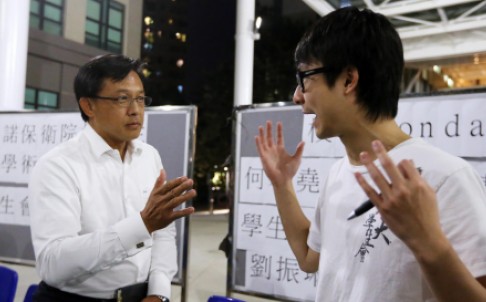
Ho's comments came during a
question-and-answer session, during which two students swore at him. They
also accused him of not being able to provide views on liberal arts - the
cornerstone of the university's curriculum for which it has been recently
named one of the top 10 in Asia by Forbes Magazine.
Suddenly slamming his microphone on the
table, Ho then accused Philip Lau Chun-lam, the student union president, of
attacking his family personally. Lau later said he had asked if Ho would
flirt with his wife in the way he suggested students did with one another.
Speaking after the meeting, Ho said the
students' rude attitude was not something taxpayers would expect. But Lau
said: "The students think he didn't respect us through the language and
action he chose, despite claiming to be humble."
(Oriental
Daily) November 10, 2015.
At the discussion forum, Junius Ho said
that he "would definitely not interfere with academic freedom, telling
people what to do and what not to do ... doing what I am not supposed to
do." He also said that government appointments do not corrupt the university
system. "If the universities have gone bad, society will speak up."
Towards the end of the discussion forum, a
student asked Junius Ho just what is a "refined education" (=Lingnan
University motto), and how Ho can help the university develop. Ho said that
he is just a "newbie" and he wants to help Lingnan University get more
resources in the future. But the students thought that Ho was being evasive
and used foul language to accuse Ho of being "fucking overbearing." Ho said
that it is definitely not "refined education" when students employ foul
language. He added suddenly: "I believe that you students will use foul
language to flirt around." Student Union president Philip Lau countered:
"Will you flirt with your wife with foul language?" Ho put down his
microphone and left quickly.
Afterwards, Lau clarified that he was not
making a personal attack on Ho's family. Lau said that Ho failed as a
university trustee to answer the students' questions to their satisfaction.
He said that Ho was disrespectful of the students. However, the Student
Union will continue to invite other university trustees to attend future
discussion forums.
(Apple
Daily) November 10, 2015.
A student questioned Junius Ho about the
claim of being a social worker. Because Ho does not seem to understand the
meaning of the term, he is unqualified to be a trustee. Ho replied: "How do
you know that I won't become a genuine social worker some day?" A student
wanted Junius Ho to resign as trustee. Ho pointed a finger at the students
and said: "You are not a taxpayer. What right do you have to tell me to
resign?" Ho kept telling the students to stop hitting the dead end. He
emphasized that his appointment as trustee is a final decision. "Go home and
study some more first."
Related links:
Lingan
University clash
Fuck the Police
Videos:
(Epoch
Times) Part 1 of discussion forum
(Epoch
Times) Part 2 of discussion forum
(Epoch
Times) Part 3 of discussion forum
(Epoch
Times) Part 4 of discussion forum
(Epoch
Times) Lingnan University Student Union president speaks to the
press
(Epoch
Times) News report
(Speakout
HK)
0:01 Philip Lau: Junius is completely unqualified to become a Lingnan
University trustee. Anti-democracy, incapable to telling right from wrong,
selling his character, ignorant idiot, incapable of telling black from
white. Never mind becoming a trustee, he should not even be accepted as a
student.
0:15 Radio host: I think that some of your choice of words have stepped
over the line.
0:27 Philip Lau: Firstly, he supports highly the undemocratic replacement
system. He is anti-democracy.
0:36 Junius Ho: Firstly, he spoke of the replacement system. As everybody
knows, when I was the Solicitors Association president, I opposed the
replacement system. On a basic matter like this, he has failed to do his
homework.
0:59: Philip Lau: In order to consolidate the support by the New
Territories aborigines and to protect his votes, he opposes the government
from clearing out the illegal housing structures in the New Territories.
1:11: Junius Ho: On the matter of the ancestral houses, an illegal
structure is an illegal structure. On many occasions on radio, in essays and
during interviews, I have stated clearly: If it is against the law, then it
is against the law; if it needs to be demolished, it should be demolished.
The plan for people to report their own illegal structures motivates certain
people. They may have broken the law but they reported themselves in for the
illegal structures. I oppose this kind of incentive method. Student Lau, you
used inappropriate terms and your research work is inadequate. I hope that
you can be more diligent.
Internet comments:
- Junius Ho's statement (via Facebook)
Yesterday I earnestly attended the
consultative meeting of the Lingnan University Student Union.
Unfortunately the event could not be completed. Firstly, although I was
forced to stop my speech against my will, I still have to apologize to the
vast majority of students who really wanted serious exchange and
participation.
Prior to my attendance, some friends
thought that I didn't need to do so. But I thought that the students are
rational and pragmatic, so that more contacts will eliminate certain small
misunderstandings. That was how I happily came to this refined institution
but left unhappily afterwards.
During the entire consultative session, I
listened carefully to the various opinions, including some which were
erroneous. I also sincerely offered my opinions. I firmly believed that
humility and calm discussions can increase mutual understand and trust.
Towards the end of the discussion
session, two students used foul language to criticize me. I said that this
was inappropriate for an institute of higher learning and the students
should perhaps keep this kind of talk private. At this time, the Student
Union president Philip Lau Chun-lam said that I should keep these
foul-mouthed words to say to my wife. I was astonished at the insult
hurled at my wife! I think that any self-respecting person should ceased
participation in this even. Therefore I stood up and said that I wanted to
withdraw. A university is a place to seek knowledge. Freedom of expression
should be valued. The United Nations Human Rights Charter is based upon a
quest for fundamental human rights, respect for people's character and
values and gender equality. In this environment where even fundamental
respect is absent, what is the purpose of freedom of expression and
rational discussion?
I state that I can tolerate any abuse
heaped at me, and I will hold myself back. But as a responsible gentleman,
I must defend the honor of my wife and family. I believe that we must
respect women and not use foul language to insult any women.
Furthermore, as a university trustee, I
am obliged to defend the honor of the university and stop the students
from taking more inappropriate actions. Therefore, I was forced to
terminate my attendance at this discussion session.
I believe that this was the result of
certain individual students. I firmly believe that most Lingnan University
students are excellent. Therefore I will devote myself even more into
fulfilling my duties as a Lingnan University trustee.
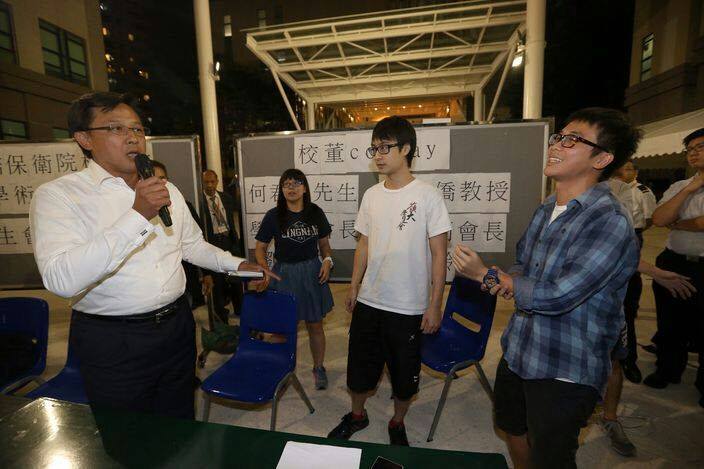
- Caption created by Silent Majority
Facebook: "You are fucking overbearing! You even dare to criticize us for
using foul language!"
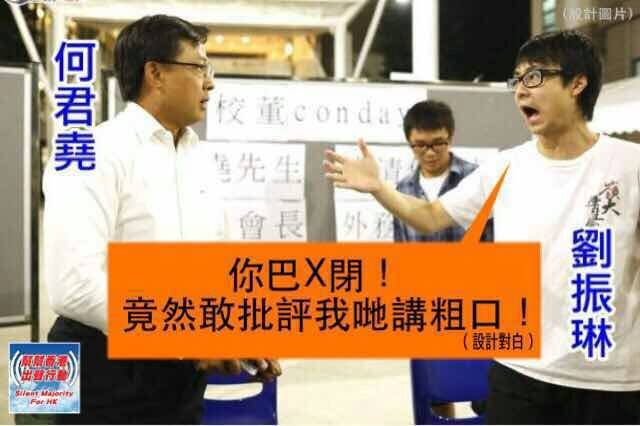
- A so-called university student should
know some basic manners.
If you post at the Golden Forum, you can use as much obscene language as you
want. If you post at the Baby Kingdom forum, you will be banned for using
obscene language.
If you gather with old boys' school classmates to sing karaoke, you can use
as much obscene language as you want. If you gather at your grandparents'
home for the Winter Festival dinner, you should not use obscene language
(unless you have a special kind of family).
If you demonstrate against a senior government official in a public event
(such as the national flag ceremony), you can use as much obscene language
as you want. If you invite a guest to attend a discussion forum that you are
hosting, you should not use obscene language against the guest (unless this
is a special kind of guest).
Just because obscene language is standard at the Golden Forum does not mean
that it is appropriate everywhere else.
- Why are we surprised at what is happening
at Lingnan University? Who attends Lingnan University anyway? Those who
couldn't get accepted at the other universities (Hong Kong University,
Chinese University of Hong Kong, University of Science and Technology,
Polytechnic University, Baptist University, City University).
- Those who are not even accepted by Lingnan University can choose between
Shu Yan and the Institute of Education.
- Given their low self-esteem, using foul language is one way for Lingnan
University students to establish their pre-eminence in one field.
- Freedom of expression includes being free
to say terrible things about your wife. Junius Ho was interfering with the
students' freedom to say terrible things about his wife. Therefore he is
attacking freedom of expression. Therefore he must resign as a trustee.
- I completely agree with this argument. We will line up the entire board of
trustees and we will say terrible things about their spouses and parents.
Any trustee who is offended is attacking freedom of expression and must
resign immediately.
Among those survive the test, we will next threaten them with physical harm.
Any trustee who wants to summon the police is attacking our freedom of
expression and must resign immediately.
We will see how many trustees are left.
- What were Junius Ho's options at that
moment? Pick one or more from the following
(1) Get up and leave silently
(2) Get up and explain why you are going to leave
(3) Tell the other person who insulted your wife that he should reserve the
use of foul language for his own mother
(4) Tell the other person: "I fuck your mother's stinking rotten cunt!"
(5)
Smash
the electric guitar (if there is one around) and the rest of the
audio-visual equipment
(6) Toss the microphone at that other person and spit at him
(7) Charge over and beat the other person into a pulp
(8) Pick up the table and smash it over the head of the other person
(9) Other [Fill in yourself]
- Junius Ho had it coming. By accepting the
invitation to attend a Lingnan University Student Union discussion forum, he
is provoking the students into extreme actions. Therefore Junius Ho is
responsible for everything that happened afterwards. He has no one to blame
but himself. As university trustee, Junius Ho should have stayed home.
- I completely agree with this argument. That female European backpacker was
provoking the men when she traveled through India. Therefore she is
responsible for everything that happened afterwards. She has no one to blame
but herself. As a European woman, she should have stayed home to cook and
clean.
- If we overturn the existing university
ordinances, what will we have instead? We love to abide by international
standards, don't we? Here are the systems at the five largest American state
university systems.
(Wikipedia)
University of California Regents
The Regents of the University of
California is the governing board of the University of California system.
Chartered by the California Constitution, the board has 26 voting members.
The California Constitution grants broad
institutional autonomy with limited exceptions to the Regents. According
to article IX, section 9, "The University shall be entirely independent of
all political or sectarian influence and kept free therefrom in the
appointment of its regents and in the administration of its affairs."
The majority of the board (18 Regents) is
appointed via nomination by the Governor of California and confirmation by
the California State Senate to 12-year terms. One student Regent is
appointed by the Board for a one-year term. The remaining 7 Regents are ex
officio members. They are the Governor, Lieutenant Governor, Speaker of
the State Assembly, State Superintendent of Public Instruction, president
and vice president of the Alumni Associations of UC, and president of the
University of California.
The Board also has two non-voting faculty
representatives. The incoming student Regent serves as a non-voting
Regent-designate from the date of selection (usually between July and
October) until beginning their formal term the following July 1.
The vast majority of the Regents
appointed by the Governor historically have consisted of lawyers,
politicians and businessmen.[3] Over the past two decades, it has been
common that UC Regents appointees have donated relatively large sums of
money either directly to the Governor's election campaigns or indirectly
to party election groups.
(University
of Texas System)
The Board of Regents, the governing body
for The University of Texas System, is composed of nine members who are
appointed by the Governor and confirmed by the Senate. Terms for Regents
are scheduled for six years each and staggered so that three members'
terms will usually expire on February 1 of odd-numbered years. In
addition, the Governor appoints a Student Regent for a one-year term.
(Wikipedia)
State University of New York
SUNY is governed by a State University of
New York Board of Trustees, which consists of eighteen members, fifteen of
whom are appointed by the Governor, with consent of the New York State
Senate. The sixteenth member is the President of the SUNY Student
Assembly. The last two members are the Presidents of the University
Faculty Senate and Faculty Council of Community Colleges, both of whom are
non-voting. The Board of Trustees appoints the Chancellor who serves as
SUNY Chief Executive Officer.
(Wikipedia)
Floridia Board of Governors
The Florida Board of Governors is a
17-member governing board that serves as the governing body for the State
University System of Florida, which includes all public universities in
the state of Florida.
The Florida Board of Governors has
seventeen members, including fourteen voting members appointed by the
governor, as well as, the Florida Commissioner of Education, the Chair of
the Advisory Council of Faculty Senates, and the President of the Florida
Student Association.
(Wikipedia)
University of Illinois System
The University of Illinois is a system of
public universities in Illinois consisting of three campuses:
UrbanaûChampaign, Chicago, and Springfield.
The system is governed by a Board of
Trustees consisting of thirteen members: the governor of Illinois serves
as an ex officio member, nine trustees are appointed by the
Illinois Governor, and a student trustee elected by referendum represents
each of the university's three campuses. One of the three student trustees
is designated by the governor to have a vote.
Why are the systems so similar? Why do the
faculties and students have so little power? Because (1) the university
system is supported by public funds; (2) the students are transient and
therefore not knowledgeable in long-range planning; (3) the faculties have vested
interests (e.g. they like huge pay raises for themselves). But in Hong Kong nowadays, the faculties and students want to take
charge. There needs to be better arguments than "freedom" and "democracy."
- (HKG
Pao)
In response to Junius Ho's Facebook, the
Lingnan University Student Union responded on Facebook. "Our Union is deeply
sympathetic to those students whose valuable time was wasted by Mr. Ho, and
we understand why our fellow students are so angry." In so doing, they
justify the students for using foul language.
Within one day, several hundred comments
were posted against the students. Here is a sample:
- You used foul language against someone
who leaves. Then you follow up by saying that this person disrespected you.
Are you Lingnan University boys shameless to this extent?
- You are shameless and you don't
deserve to be known as students. Please do not waste the
love/effort/time/money that your parents spent on you. The university
subsidies should be terminated. You should not be wasting taxpayers' money.
- It is no big deal to use foul
language. But after cursing people out, you require that they not walk away
because it would be disrespecting you. What do you know about 'respect'?
Don't make me laugh. You university students are shameless.
- I would like to know if the Lingnan
student body agrees with the actions of their foul-mouthed student union
president? If the answer it NO, then the Lingnan students need to rise up
and defend their university's reputation! Otherwise all of Hong Kong will
know your institution as the "foul-mouthed university" and despise you!
- What is the difference between you Yellow
Guards and the Red Guards? University students? You are worse than
illiterates!
- As a student, you couldn't win by reason
so you resort to foul language. Your performance earns zero marks.
- You only know how to make personal
attacks with foul language. This essay kept referring to pro-China persons
and political backgrounds, etc. There is no actual evidence of any sort
being offered. This is using conspiracy theories to make a political
judgment.
- You wrote such a long essay with all
sorts of reasons and excuses to gloss over your ugly deed, precisely because
you know that your deed was ugly.
The essay also declared: "If Mr. Ho truly
has no political background and baggage, then as a member of the New
Territories Concern Group and Defend Central, he has openly criticized
Occupy Central many times as an illegal activity ... if this isn't political
background, then what is political background?" In response:
- When a citizen makes an open criticism
that the illegal Occupy Central is illegal, it means that this citizen has a
political background? Are university students so arrogant and presumptuous
that they cannot allow citizens to call an illegal activity for what it is?
90% of the people of Hong Kong believe that Occupy Central is illegal and
should be stopped. Are they all pro-China/pro-establishment/anti-democracy
according to the Lingnan University Student Union?
- Criticizing Occupy Central implies
political background? Occupy Central affected the livelihoods of many
citizens and it is indeed against the law (e.g. incitement and participation
in unlawful assembly, etc). Any normal citizen would be criticizing Occupy
Central. During that period, you will hear many criticisms if you walk into
a tea restaurant that is showing television news. On the contrary here, I
think that you have a thick and heavy political background when you attack
the university trustees.
- Criticizing Occupy Central = political
background. Fine. But does using foul language to intimidate people = triad
gang background?
- You want political background? You got
political background. According to (Ming
Pao), the first student to use foul language against Junius Ho
second-year social sciences student Chow Wai-lok. Mr. Chow is a member of
the radical political party Civic Passion. Chow said that he had planned
beforehand to use foul language. In saying "overbearing", he added "fucking
overbearing" to make a point of emphasis.
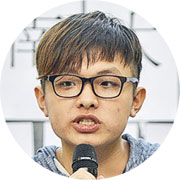
- So it is the supporter of one political party making a foul-mouthed attack
on a supporter of an opposing camp. No big deal. It happens every day.
Except it is the reputation of Lingnan University that is being tarnished.
It is currently being known just as "Foul-mouthed University."
- According to Chow Wai-lok, he only uses
obscene language with close friends and he would never do so in front of
elders and teachers. However, he was dissatisfied with Junius Ho's conceited
attitude and evasive answers. Therefore he used foul language to humiliate
Ho. That's great. Hereafter anyone who fails to provide an answer to your
satisfaction needs to be cursed out. No wonder "Long Hair" Leung Kwok-hung
gets cursed out everywhere that he goes (#341).
- (1) Chow Wai-lok only uses obscene language with close friends; (2) Chow
Wai-lok used foul language to humiliate Ho. Therefore Chow insults his close
friends with obscene language. So don't be close friends with him if you
don't want to be insulted.
- I watched the video. I thought that Chow Wai-lok was overbearing and I
objected to this use of foul language. Therefore I say to him: "I fuck your
mother's stinking cunt!" in order to humiliate him. This message has been
approved by Chow Wai-lok.
- Chow Wai-lok has just started a new meme along the line of "I am normally
well-mannered and I don't use foul language, but this time [FILL IN THE
BLANKS YOURSELF]".
- And if Junius Ho brushed off Chow's foul-mouthed verbal tirade, Chow will
surely escalate to "stop tyranny by the use of physical force."
- Chow Wai-lok was wrong to use foul language against Junius Ho. Fortunately
the student union president Philip Lau corrected Chow by telling Ho that he
should go home and use foul language with his wife.
Q1. How concerned about the
District Council elections?
38%: Very concerned
27%: Somewhat concerned
24%: So-so
5%: Not too concerned
3%: Not concerned at all
2%: No opinion
Q2. Do you
think that the election atmosphere is excited now?
10%: Very excited
25%: Somewhat excited
47%: So-so
10%: Somewhat unexcited
5%: Completely unexcited
2%: No opinion
Q3. What is
the main factor when you choose a candidate to vote for?
1%: Fame
14%: Policy platform
40%: Political party affiliation/political position
3%: Personal image
35%: Past job performance
4%: Other
4%: No opinion
Q4. Do you
want your District Councilor to focus on Hong Kong-wide issues or local
district issues?
30%: Hong Kong-wide issues
57%: Local district issues
13%: No opinion
Q5. How
satisfied are you with your local district councilor?
10%: Very satisfied
25%: Somewhat satisfied
38%: So-so
10%: Not too satisfied
9%: Completely dissatisfied
6%: Don't know my district councilor/hard to say
2%: No opinion
Q6. When
will you make your voting decision?
27%: On the day of the vote
26%: Within one week before the vote
14%: Within two weeks before the vote
24%: More than two weeks before the vote
10%: No opinion
Q7. Will
you vote in the November district elections?
62%: Definitely yes
22%: Most likely yes
4%: Most likely not
7%: Definitely not
1%: No opinion
Q8. Will
you vote for a pro-Occupy Movement candidate?
28%: Yes
50%: No
11%: Hard to say
10%: No opinion
Q9. If the
district elections were held tomorrow, who would you vote for?
31%: The incumbent district councilor
22%: The opponent of the incumbent district councilor
41%: Undecided
2%: The incumbent district councilor is not running or is unopposed
4%: No opinion
Q10. If the
district elections were held tomorrow, who would you vote for?
13%: Candidates with pan-democratic party backgrounds
23%: Candidates with pro-establishment backgrounds
24%: Independent candidates
38%: Undecided
2%: No opinion
Q11.
Pan-democratic political party support (among the 13% who said that they would
vote for candidates with pan-democratic political party backgrounds.
14%: People Power
3%: Labour Party
29%: Civic Party
39%: Democratic Party
1%: ADPL
3%: League of Social Democrats
1%: Neighborhood and Workers Service
2%: Neo Democrats
8%: Other pan-democratic political groups
Q12. Pro-establishment political party support
(among the 23% who said that they would vote for candidates with
pro-establishment political party backgrounds)
17%: Federation of Trade Unions
51%: Democratic Alliance for Betterment of Hong Kong
6%: Liberal Party
5%: Business and Professionals Alliance for Hong Kong
14%: New People's Party
6%: Other pro-establishment political groups
1%: No opinion
Q13. What
is the principal source of election information?
16%: Internet
22%: Printed newspapers/magazines
5%: Family/friends
2%: Radio
4%: Television
26%: Campaign promotional materials
16%: Other
9%: No opinion

(SCMP)
How Hong KongÆs electoral system only discourages political moderates. By Gary
Cheung. November 16, 2015.
The findings of the survey commissioned by
the Path of Democracy, in which 41.9 per cent of the 1,010 respondents
interviewed between October 12 and 17 identified themselves as moderates,
came as a ôsurpriseö to the groupÆs convenor, Ronny Tong Ka-wah.
The poll, conducted by the University of
Hong KongÆs public opinion programme, found that 28.4 per cent supported the
pan-democrats and 11.4 per cent said they backed the pro-establishment camp.
Tong, who resigned as a lawmaker and quit
the Civic Party in June to advocate a moderate path to democracy, said the
findings showed that the level of support for the pan-democratic and
pro-establishment camps may no longer follow conventional wisdom. Over the
past two decades, it has been the case that pan-democrats won nearly 60 per
cent of the popular vote and the government-friendly camp took about 40 per
cent in Legislative Council elections.
Noting that the poll found more than 53 per
cent of interviewees felt it was necessary to communicate with Beijing, Tong
believes there may now be a larger proportion of moderates in Hong Kong. But
Tong and his group didnÆt perhaps need to fork out thousands of dollars on a
survey to discover that a substantial majority of Hongkongers see themselves
as moderates; itÆs actually not that surprising.
According to a poll commissioned by the
Post last September, some 56 per cent of 1,004 respondents considered
their political stance as ôthe middle ground or have no preferenceö. Some 33
per cent identified themselves as ôdemocratsö while another 7.4 per cent
said they were ôpro-Beijingö. The poll was also conducted by HKUÆs public
opinion programme.
Another Post-commissioned survey,
conducted by Chinese UniversityÆs Institute of Asia-Pacific Studies in
January, found that 49.5 per cent of the 907 respondents said they were in
the ômiddle groundö. It sounds natural that most Hongkongers consider
themselves moderates; it is a socially desirable answer when they are
approached by pollsters.
The controversial remarks by Chan Kin-por,
chairman of the Legco Finance Committee, that it takes fewer than 30,000
votes to win a seat in a geographical constituency, raises the point that
the proportional representation (PR) system does not encourage moderates who
take into account mainstream public opinion.
Chan, who was returned unopposed in 2012 as
the insurance sector legislator, said the existing electoral system was
abnormal. He concluded that radical lawmakers who mounted filibusters were
unlikely to be punished by voters under the present system.
Under the system, adopted since 1998,
parties or non-affiliated groups rank candidates on lists. Their chance of
winning a seat is based on a ôquotaö û obtained by dividing the number of
valid votes cast in the constituency by the number of available seats.
If a party gets enough votes to meet the
quota, it automatically wins a seat. Whoever gets the remaining seats is
determined by ranking the so-called remainder votes. Under the current
system, having a small but fervent support base is enough to win a seat even
if you go against the majority view.
The system, which nurtures minority and
even radical voices, explains why Chief Executive Leung Chun-yingÆs repeated
appeals to voters to punish at the ballot box radical lawmakers who
filibuster government bills has proved to be wishful thinking.
Besides, it has spurred a fragmented
legislature, which makes it more difficult for government officials to
canvass lawmakersÆ support. In 2013, Executive Council convenor Lam
Woon-kwong called for a review of the PR system. He argued that even if the
most capable person was chosen as chief executive in 2017, he or she could
hardly solve the deadlock in governance if the system remained intact.
But with both the pro-establishment and
pan-democratic camps in a comfort zone under the system, few across the
political spectrum will seek to change the status quo in the foreseeable
future.
(EJ
insight) Academic freedom: what is it and is it under threat? By
Michael Chugani. November 9, 2015.
Is academic freedom under threat in Hong
KongÆs universities?
To answer that question, it is necessary to
first define what academic freedom means.
This is how Encyclopedia Britannica defines
it: ôAcademic freedom is the freedom of teachers and students to teach,
study, and pursue knowledge and research without unreasonable interference
or restriction from law, institutional regulations, or public pressure.
ôIts basic elements include the freedom of
teachers to inquire into any subject that evokes their intellectual concern;
to present their findings to their students, colleagues, and others; to
publish their data and conclusions without control or censorship; and to
teach in the manner they consider professionally appropriate.
ôFor students, the basic elements include
the freedom to study subjects that concern them and to form conclusions for
themselves and express their opinions.ö
Simply put, there are two key points in
Encyclopedia BritannicaÆs detailed explanation of academic freedom.
In the case of professors, they should be
allowed to teach and research in the way they want.
In the case of students, they should be
allowed to study whatever subjects they want.
Many students, professors and politicians
have claimed in recent weeks that the University of Hong Kong councilÆs
rejection of Johannes Chan Man-mun as pro vice chancellor has put academic
freedom in Hong Kong under threat.
How true are these claims?
The answer lies in impartially studying the
Encyclopedia BritannicaÆs definition of academic freedom.
Are teachers and students still free to
pursue knowledge and research without unreasonable interference even though
the HKU council has rejected Chan as pro vice chancellor?
Are students still free to study whatever
subjects they want and form their own opinions?
Are professors still free to teach the way
they want and to publish research papers in the way they want?
If the answer is yes to all three
questions, then academic freedom is alive and well even though Chan did not
get the job as pro vice chancellor.
If the answer is no, then those who believe
academic freedom is now under threat must give clear examples of students
not being able to choose what they want to study and professors not being
able to teach in the way they want.
Academic freedom is one of our core values.
It is crucial to Hong KongÆs way of life.
For that reason, it is irresponsible,
especially for politicians and professors, to make loose claims about
academic freedom being under threat without providing credible proof.
It is dangerous, puzzling and silly to
suggest that academic freedom is dependent on Chan Man-mun being made pro
vice chancellor of HKU.
Academic freedom is not dependent on one
person alone, regardless of how qualified that person is.
Now that the HKU council has rejected Chan
as pro vice chancellor, is there any evidence that academic freedom has been
damaged?
Are students no longer allowed freedom of
thought and choice of subjects?
Have professors who took part in a silent
protest in support of Chan been fired?
Has the HKU ordered professors to abstain
from expressing political opinion or joining protests?
Has the HKU council censured, punished or
thrown out Billy Fung Jing-en, the student union representative in the
council, for revealing details of a confidential meeting regarding Chan?
The answer is, of course, no.
Nothing has changed even though Chan has
not been given the job of pro vice chancellor.
In fact, the controversy over Chan has
increased academic freedom.
Students are speaking out more.
Professors are speaking out more.
Alumni members are speaking out more.
And the general public now has a better
understanding of how university policies are made.
All this new-found awareness and interest
in our universities can better guard academic freedom than the appointment
of Chan.
Those who warn that academic freedom is
under threat justify their warning by claiming that Chief Executive Leung
Chun-ying, who, by tradition, is the chancellor of all of Hong KongÆs
universities, has politically interfered with university matters by blocking
the appointment of Chan.
They say Leung interfered through the six
members that the chief executive traditionally appoints to the HKU council.
They also claim the central government has
instructed pro-Beijing members of the council to block ChanÆs appointment.
There is a widespread but erroneous belief
that Leung appointed six members to the council.
The fact is he appointed only two û Arthur
Li Kwok-cheung and Leonie Ki Man-fung.
The remaining four were appointed by his
predecessor, Donald Tsang Yam-kuen.
Did Leung instruct Li and Ki to vote
against ChanÆs appointment?
Does he have any influence over the four
council members appointed by Tsang?
Would the four have followed his order to
oppose Chan?
No one knows for sure, but those who make
the claim that he interfered have the responsibility to provide proof.
Of the 20 members who voted, the 12 who
opposed Chan are seen as pro-establishment, and the eight who supported him
are seen as pro-democracy.
It is highly presumptuous and one-sided to
claim that the 12 pro-establishment members who opposed Chan did so for
purely political reasons on the orders of Beijing but the eight who
supported him did so not for political reasons but purely because they
believed he was the best person for the job.
The truth is that both sides are playing
politics.
The whole issue has become a political
tug-of-war.
Anyone who doesnÆt admit this is a
hypocrite.
How can anyone deny that politics are
involved when the clear fact is that all those who support Chan are from the
democracy camp and all those who oppose him are from the pro-establishment
camp?
Hongkongers need to face the truth that
politics is involved instead of so readily believing that academic freedom
is at risk.
Politics entered the tug-of-war over
whether Chan should be appointed pro vice chancellor when it became known
that he had a part in handling HK$1.45 million (US$190,000) given to Occupy
Central co-organizer Benny Tai Yiu-ting by an anonymous donor to partly
finance the Umbrella movement.
The democracy camp fully supported the
Umbrella movement to fight for so-called genuine democracy, but the Hong
Kong and central governments and the pro-establishment camp fiercely opposed
it.
Opinion polls showed that just under half
of Hong Kong supported Occupy Central and just over half did not.
The left-wing media began a campaign
against Chan, claiming he was unsuitable as pro vice chancellor because he
had supported Occupy Central and had mishandled the anonymous donation to
Tai.
The democracy camp, led by Apple Daily,
struck back by accusing Leung and the central government of interfering in
academic freedom and the councilÆs vote on HKUÆs selection committeeÆs
recommendation that Chan be appointed pro vice chancellor.
Which side brought politics into the matter
first?
Is it democracy camp members at HKU, such
as Tai, Chan and the students who supported Occupy Central, or the left-wing
media that said Chan was not suitable as pro vice chancellor because of his
support of Occupy Central and his mishandling of an anonymous donation to
partly finance the movement?
Each side is blaming the other for
politicizing the matter.
It is up to each one of us to decide for
ourselves who is to blame.
We also have to decide for ourselves
whether the 12 council members who voted against Chan did so under orders
from Beijing or whether they genuinely believed he was not suitable for the
job because of his involvement in Occupy Central.
We have to decide for ourselves if the
eight who supported Chan did so because they genuinely believed he was
suitable for the job or if they did so because he belongs to the democracy
camp.
LeungÆs recent appointment of five new
members to the Lingnan University council has sparked a new political
controversy, because two of the five had openly opposed Occupy Central.
The democracy camp and Lingnan University
students have criticized the appointments with the argument that the two are
not suitable as council members and will threaten academic freedom because
of their opposition to Occupy Central.
It is up to each one of us to decide if
only supporters of Occupy Central should have the right to become council
members of universities and only Occupy Central supporters are capable of
upholding academic freedom.
We should ask ourselves whether academic
freedom is also under threat if university councils consist only of Occupy
Central supporters.
IsnÆt academic freedom similarly threatened
if opponents of Occupy Central are vilified and not given the freedom to
think, teach and study the way they want?
The tug-of-war over Chan is not really
about academic freedom.
It is in fact a proxy war between the
democracy camp and Beijing.
It is a continuation of the Occupy
uprising.
(Oriental Daily) November 9, 2015.
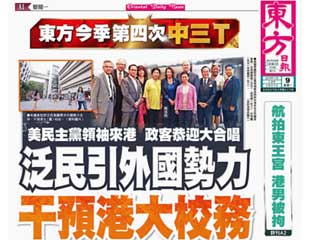
Orientail Daily front page cover
US Democratic Party leader visits Hong Kong, politicians come in greeting
chorus
Pan-democrats bring in foreign forces
to interfere with University of Hong Kong affairs
US Congress Democratic leader Nancy Pelosi
and six other Congressmen came to visit Hong Kong. Yesterday the group met
with Chief Executive CY Leung. Later they met with the pro-establishment
camp led by Liberal Party honorary chairman James Tien. They also met with
the pan-democratic political parties including Civic Party's Alan Leong,
Democratic Party's Emily Lau, Labour Party's Cyd Ho, the accountancy sector
legislator Kenneth Leung, and former legislators Martin Lee and Anson Chan.
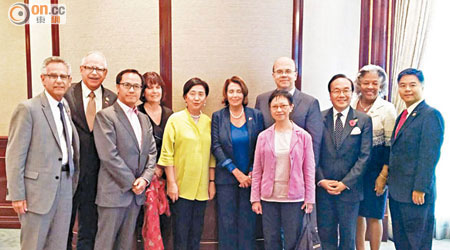
When contacted by our newspaper, Emily Lau
and Alan Leong confirmed that they met with Pelosi. They admitted frankly
that they brought up the string of events at the University of Hong Kong. In
particular, Lau told Pelosi that the university is an index for Hong Kong.
So it there are problems at the university, it means that there are problems
in Hong Kong. Leong said that he said during the meeting that Hong Kong is
looking at many attempts to destroy its system and values, and that the
university is Hong Kong's bridgehead for academic self-determination and
freedom.
Alan Leong quoted one congressional
delegate as saying that academic freedom and self-determination are the
foundation of Hong Kong and that many American universities believe that it
to provide support as civic societies through institutional
relationships. Leong also said that Pelosi agreed with the statement by this
congressional delegate.
Martin Lee and Anson Chan's spokespersons
confirmed that the two met with Nancy Pelosi and brought up the situation in
Hong Kong. Martin Lee said that he told Pelosi that there is no democracy in
Hong Kong. He also mentioned the appointment of the pro vice chancellor at
the University of Hong Kong and the university council.
University of Hong Kong council member and
Legislative Councilor Chung Shu-kan said that "the pan-democrats are making
their report to their westerner masters." He said that while the
pan-democrats say that they don't want other people to interfere with
academic freedom, they also bring the matter up with the American
politicians. This is double standards in operation. Chung Shu-kan also
criticized the "civic society support" mentioned by the unnamed congressman.
He asked: "Which American university uses civic society as the basis of its
decisions? Which university elects its chancellor by community voting?"
Legislator Wong Kwok-kin said that "whining
to the foreigners" has become a habit for the pan-democrats. He said that
the University of Hong Kong matter is an internal personnel matter that has
nothing to do with academic freedom. He wondered if the pan-democrats are
politicizing the matter for the sake of the upcoming elections. He felt
embarrassed for the pan-democrats who are whining to the foreigners. He said
that if the United States truly respect academic freedom, then they should
leave the matter in the hands of the University of Hong Kong and not
interfere. Otherwise, matters are going to get worse and even the foundation
of the University of Hong Kong may be wrecked.
Hong Kong University Alumni Concern Group
convener and education sector legislator Ip Kin-yuen had said many times
that he supports academic self-determination and freedom. When informed that
the pan-democrats have brought up the University of Hong Kong events with
Nancy Pelosi, Ip Kin-yuen said that the Hong Kong and other governments
should not be meddling with the affairs of the University of Hong Kong. He
insisted that there was nothing wrong with the pan-democrats meeting with
Pelosi because "this is just a discussion for both sides to understand what
is going on."
As for the congressman saying that American
universities can offer support to the University of Hong Kong as civic
societies, Ip Kin-yuen said that he is unsure about the meaning of civic
society here. Since academic scholarship has no boundaries, many
institutions can express opinions on matters of common concern and scholars
can issue joint statements.
Hong Kong University Students Union
president Billy Fung Jing-en did not respond to our inquiries.
(Hong
Kong Free Press) Pan-dems slammed by Oriental Daily for æinvitingÆ
foreign interference after meeting US delegation. November 9, 2015.
Local media newspaper Oriental Daily has
slammed pan-democrats for ôactively inviting foreign forces to intervene in
affairs,ö after four lawmakers brought up the recent controversy surrounding
the University of Hong Kong (HKU) during a meeting with a delegation of US
Democratic Party House of Representatives members on Sunday.
The delegation, led by the US Democratic
Leader of the House Nancy Pelosi, met with a conglomeration of local
lawmakers and politicians during the Hong Kong leg of their China trip.
These included Chief Executive Leung Chun-ying, Liberal Party Honorary Chair
James Tien, former Chief Secretary Anson Chan, Democratic Party founder
Martin Lee, Scholarism convenor Joshua Wong, and co-founder of the
pro-democracy Occupy protests Professor Benny Tai.
The group also spoke to Labour Party
lawmaker Cyd Ho Sau-lan, Democratic Party Chairwoman Emily Lau Wai-hing,
Civic Party leader Alan Leong Kah-kit, and The Professional Commons founder
Kenneth Leung Kai-cheong for around an hour at the Island Shangri-la hotel.
During the meeting, Leong raised many of the issues Hong Kong is currently
facing, such as the failure of the Central Government to implement universal
suffrage as promised under the Basic Law. He also said that the
pan-democrats had been working hard to defend Hong KongÆs existing values
and systems, but nothing much had changed and he hoped Pelosi would make
China aware of the situation.
Cyd Ho said that the US should not give up
on the opportunity to speak for Hong Kong in the face of business deals with
China. Emily Lau said that Leung Chun-ying was dividing the city, and that
the Central Government was increasingly interfering in Hong Kong affairs.
She also said she hoped the US would remind China to live up to its promise
under the Basic Law, which guarantees that Hong Kong people would be
governing themselves and enjoying a high degree of autonomy.
The pan-democrats discussed the HKU
academic freedom controversy with Pelosi, which they said was very serious,
because ôif HKU fell, Hong Kong would be finished.ö A Democratic member
commented that higher education institutions in the US were aware of the
issue and they were raising awareness about it.
The discussion on HKU was criticised by
Oriental Daily, who said that the pan-democrats were actively inviting
foreign intervention by the US. The article cited HKU Court member and
Legislative Councillor Chung æTree GunÆ Shu-kun as saying that the
pan-democratic lawmakers were ôreporting to their mastersö and that they
were ôemploying double standards for telling people not to interfere in
academic freedom, but now raising the issue with foreign representatives.ö
Legislative Councillor Wong Kwok-kin was also quoted as saying that the
pan-democrats had made a habit of asking for help from foreign countries,
and that the HKU affair had nothing to do with academic freedom.
Pelosi will be taking the delegation to
China, where they are expected to meet Chinese officials, leaders and
students, to discuss issues such as national security, human rights, and
climate change. They will also be visiting Tibet. In the past, Pelosi has been
openly critical of ChinaÆs human right abuse record.
(Kinliu)
When you become yellow ... By Chris Wat Wing-yin. October 31, 2015.
I really like Professor Arthur Li Kwok-cheung's
descriptor of "Party Secretary." According to the leaked audio recording,
Professor Li said that certain political parties have systematically and
aggressively promoted Johannes Chan, including using methods such as
threats, interference, forming concern groups, judicial review etc to
support Chan. So could they be acting like mainland Chinese universities to
insert Chan as their party secretary in the university?
When the principals heard that, they said
that this was absurd. The instigator Ip Kin-yuen said that this was
incredibly ridiculous.
A drunkard never thinks that he is drunk.
When you are ensnared by an evil cult, you can never understand what other
people are saying.
It has been one year since Occupy Central.
The Yellow Ribbons began by sit-in's and demonstrations; then they clashed
and smashed; then they insulted the police; then they destroyed police
vehicles and surrounded police stations; then they held up yellow umbrellas
during graduation ceremonies; then they made secret recordings during
meetings; ... each case is crazier than the previous one, sometimes even
going beyond legal and moral bottom lines. Strangely enough, those who still
have Yellow Ribbons on their Facebook continue to issue LIKEs.
This is not called supporting. This is
called blind faith.
Over the past year, I observed that many
friends lose themselves as soon as they pin on the Yellow Ribbon. You can
note the following: All those who wear Yellow Ribbons will agree with the
following positions:
1. Primary school teachers using foul
language
2. Singing foul-mouthed songs on
university campus to insult the police
3. Breaking the glass doors at the
Legislative Council building
4. Ousting the Individual Visit Permit
visitors and the parallel traders.
5. Supporting homosexuality
6. Opposing the construction of the Hong
Kong-Zhuhai-Macao bridge, the third runway at the airport, the Liantang
Boundary Control Point, developing North East New Territories.
7. Ostracizing new immigrants from
mainland China, while supporting those from elsewhere who seek political
asylum under false pretenses
8. Liking Denise Ho and disliking Wong
Jing
9. Opening umbrellas during ceremonies,
cursing out university vice chancellors/council members/trustees
10. Leaking secrets and making
surreptitious recordings
You can be sure that if Yellow Ribbons were
to commit murder, arson, rape or looting, they will be offering more LIKE's.
That is because they only know to listen to the magical pipes of the
politicians and march blindly into the dead end.
I never see Yellow Ribbons who support
Occupy Central but oppose homosexuality; or who support the third runway
but oppose the development of North East New Territoties; or who support
Johannes Chan as pro vice chancellor but deplore what Billy Fung Jing-en
did. People's opinions cannot be so uniform on everything, right? I think
that the Yellow Ribbon soldiers think the same way as when they buy the $10
bag of oranges in the market -- you have to buy the whole bag, with some
good and some bad.
The Yellow Ribbons used to object to the
"Hall of the Unified Voice" of the Chinese Communists. But they have become
their own "Hall of the Unified Voice" now. Anything Yellow is going to be
right. It does not matter if you steal, rob, loot or rape, you will be
pronounced innocent if you raise your Yellow Umbrella and chant your Yellow
Ribbon slogans (such as "I want genuine universal suffrage").
The symptoms are like the
Stockholm
Syndrome. When the hostages spend too much time with the captors,
they develop empathy with captors and never return home.
The Yellow Ribbons oppose the Chinese
Communists. Eventually they have become the Chinese Communists. They now
have their own Yellow Guards, class struggles, party secretaries, etc. When you
hate blindly too much, you sometimes become the person that you hate most.
(Hong
Kong Free Press) October 5, 2015.
Lawmaker Ray Chan Chi-chuen has said he
will resume filibustering to delay the passing of the Innovation and
Technology Bureau funding proposal in the new term of Legislative Council,
should the government fail to improve it.
ôWe cannot stop it, itÆs only a matter of
time,ö the People Power lawmaker told Ming Pao. He said that other
pan-democrat lawmakers would not join the filibuster in the Finance
Committee owing to concerns over the upcoming district council elections.
Only three of them have put forward amendments. Chan said he will only
submit some 100 amendments, therefore limiting the duration of the
filibuster. In the last term of LegCo, lawmakers æLong HairÆ Leung Kwok-hung
and Albert Chan Wai-yip also waged filibuster against the IT Bureau
proposal.
(The
Standard) October 12, 2015.
The new
chairman of the Legislative Council's Finance Committee, Chan Kin-por, said he
will do what he can to facilitate dialogue between the different political
parties and the government to ensure meetings can run smoothly.
The insurance sector
lawmaker admitted during a radio programme that the pan-democratic camp
might be unhappy with him winning the chairmanship last week, but stressed
he will try his best to conduct meetings in a fair and just manner.
Chan added that he will learn from the experience of his pro-establishment
predecessors, including Ng Leung-sing and the Liberal Party's Tommy Cheung,
in handling meetings and disputes. Ng came under heavy criticism last year
for his handling of the governmentÆs preliminary funding request for the
development of the Northeast New Territories. He survived a motion of no
confidence after pan-democratic lawmakers accused him of violating the
committee's rules of procedure by not allowing them to file new motions to
filibuster the debate.
(RTHK)
October 27, 2015.
The Legislative
Council's Finance Committee has received more than 1,100 motions from
legislators over the government's request for funding to form an Innovation
and Technology Bureau. Most of the motions are from legislators who intend to
filibuster and prolong the discussion over the controversial funding.
Independent lawmaker Wong Yuk-man alone has filed 700 motions.
The committee's chairman, Chan Kin-por, said
that at first glance, some of the motions appeared to be repetitive and may
not be allowed. But if all of them are allowed to be tabled, it would take
some 28 hours for the committee to vote on the motions, meaning that a vote on
the funding request may not come until around Christmas.
Chan said on Tuesday that he was still targeting
Friday for the vote, but would not be forcing the issue. He stressed that he
wanted to establish mutual trust with legislators. Lawmakers will be limited
to making two-minute speeches when the committee reconvenes to discuss the
funding request on Friday.
(SCMP)
October 30, 2015.
The chairman of the Legislative Council's
Finance Committee has slashed the number of motions pan-democrat lawmakers
can file in their latest bid to delay a vote on funding for a new innovation
and technology bureau. Five pan-democrats had earlier filed 1,133 motions
targeting the government's proposal, but Chan Kin-por ruled yesterday that
they could only table up to 133, or 12 per cent, at the four-hour meeting
scheduled today. Yet with pan-democrats vowing to challenge
Chan's decision by seeking to adjourn the debate, the chairman conceded that
his plan to hold the vote today could be thwarted. "It will take more than
three hours just to discuss 133 motions à and time will be spent on debating
my decision," Chan said. "So I don't know when the meeting will end [with a
vote]."
...
Independent Wong Yuk-man had filed 700
motions targeting the proposal, while League of Social Democrats chairman
"Long Hair" Leung Kwok-hung put forward 248, and People Power duo Albert
Chan Wai-yip and Raymond Chan Chi-chuen submitted 176. The Labour Party's Dr
Fernando Cheung Chiu-hung filed eight motions, and Civic Party leader Alan
Leong Kah-kit put forward one.
In his letter to the lawmakers, Chan Kin-por
said the pan-democrats' motions could be categorised into different themes,
and they had "submitted multiple motions on the same themes". "This, apart
from occupying meeting time, could not achieve anything relevant to the
duties of the committee à and I must ensure that the meeting will be
conducted in an orderly and efficient manner," he wrote. He dismissed the
suggestion that he set the cap arbitrarily, saying that with the help of the
Legco secretariat, he had read all the motions and grouped them under
themes. "It gave me watery eyes and headaches à I could have made [the
pan-democrats] happy by allowing all motions and let the meeting drag on
until Christmas, but that's not what a responsible chairman should do," Chan
told reporters on the sidelines of a Legco meeting.
Albert Chan told the Post that Chan had
"abused his power." ôI submitted 100 motions and he only accepted six, and
those reasons he gave could hardly stand,ö Albert Chan said. ôIt was
impossible to group my motions à We will ask him to explain his decisions in
the meeting tomorrow [today].ö
(Ming
Pao) October 30, 2015.
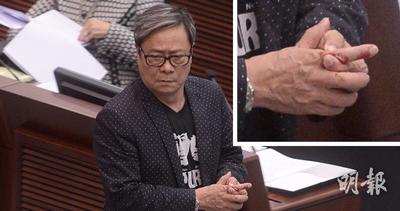
Independent legislator Raymond Wong Yuk-man
was not satisfied with chairman Chan Kin-por's rulings. So Wong approached
Chan Kin-por's table, picked up the name plate of the committee secretary
and legal adviser, slammed it on the table and threw it on the ground. There
were plastic shards everywhere, and Wong's hand began to bleed, and he had
to be bandaged by medical workers. Chan Kin-por said that Wong's conduct was
disorderly and directed him to leave the chamber. Wong did not leave at
first. Chan Kin-por then announced that the meeting was adjourned, which
means that it was pointless for Wong to hang around. As Wong departed, he
said: "I shed the first drop of blood inside the Legislative Council."
(China
Daily) October 31, 2015.
Funding for the proposed Innovation and
Technology Bureau has once again been delayed due to filibustering and
disruptive behavior by a few radical lawmakers. The Legislative Council (LegCo)
Finance Committee on Friday were left unable to vote on the proposal for the
third consecutive week, as filibustering and other antics held up the
meeting. Most lawmakers hope they can vote for funding at the next meeting
on Nov 6.
On Friday, apart from four radical
lawmakers, the opposition camp largely remained silent and did not
filibuster. This was out of concern that such behavior could cost them
dearly at upcoming district council elections on Nov 22. However, radical
lawmakers disrupted much of the two sessions, which went on for two hours
each. They did this by frequently asking trivial questions related to
motions and procedures in order to have the meeting adjourned.
Finance Committee Chairman Chan Kin-por
responded by reducing more than 1,130 repetitive and trivial motions
proposed at the meeting to just 44. This angered radical legislators Raymond
Wong Yuk-man, Albert Chan Wai-yip, Raymond Chan Chi-chuen and Leung
Kwok-hung, also known as ôLong Hairö. They loudly berated Chan Kin-por and
even left their seats to confront him at the podium. Wong threw and broke the name plates of the
chairman, the committee secretary and a legal adviser. He also resorted to
bad language on several occasions. Chan Kin-por said WongÆs unruly behavior
was ôindecentö and asked him to leave the room.
Before the meeting, Chairman Chan told
reporters he had been forced to reduce the number of motions which could be
moved. The chairman said he based this decision on the advice of the
committee secretary and the legal adviser, as well as past practices. He
asserted that he had not made any of these rulings autocratically ù as
alleged by the radicals. The legal adviser added that based on
various court verdicts, including the judgment of the Court of Final Appeal,
the Finance Committee chairman has the same power as the LegCo president.
His powers include regulating committee meetings, setting limits and
terminating debates.
(The
Sun) November 6, 2015.
The named plates of all the legislators,
government officials or secretariat workers were removed today so that
Raymond Wong could not hurt himself again.
(Hong
Kong Free Press) November 6, 2015.
Funding for the Innovation and Technology
Bureau (ITB) has finally been approved by the Legislative Council Finance
Committee. In a Legislative Council session on Friday twenty-six lawmakers
voted in favour of the HK$37 million application for staffing funds, while
eight voted against it.
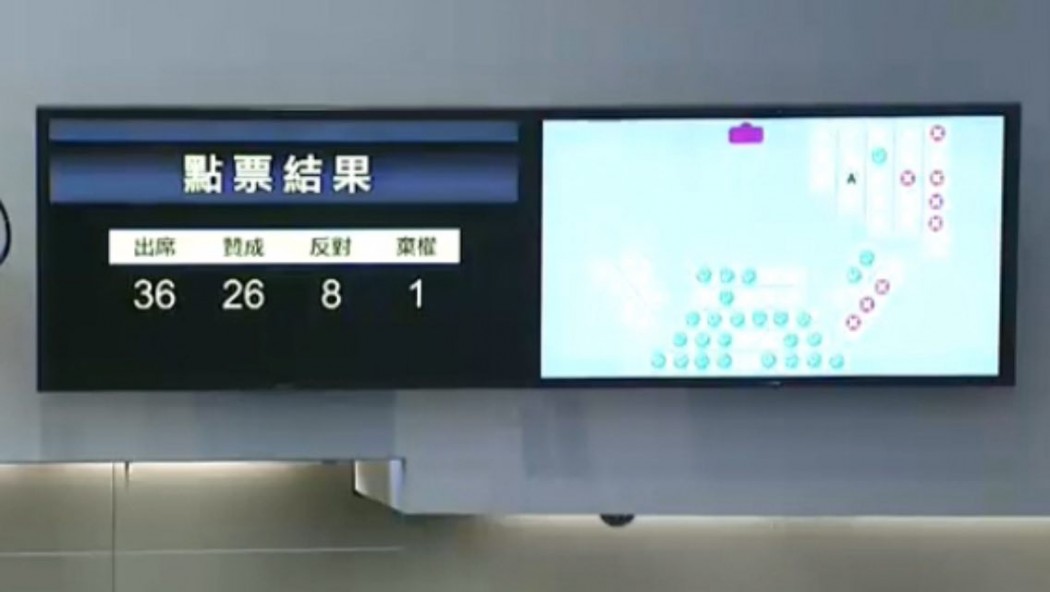
The operational funds of HK$30 million for the
ITB were approved with 29 votes in favour and nine opposed.
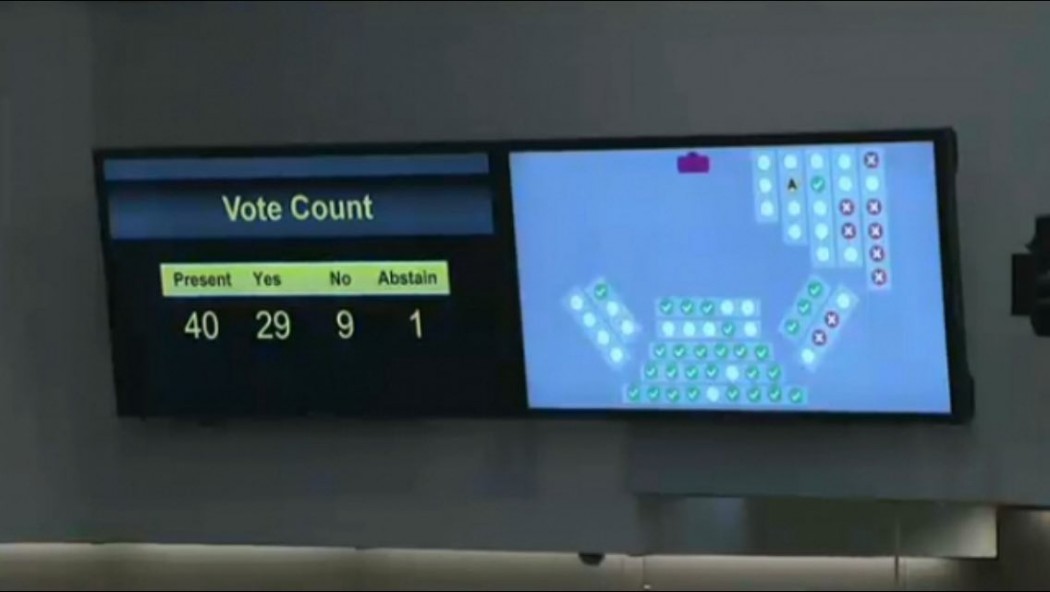
Lawmakers against the establishment of the ITB have
been trying to delay the passing of the funding by filibustering, but their
attempts were in vain as Finance Committee Chair Chan Kin-por terminated
more than 100 amendments from Leung-Kwok-hung, Albert Chan Wai-yip and Ray
Chan Chi-cheung, despite criticisms from the pan-democrat lawmakers.
A motion to set up the ITB was passed in
October 2014, but the budget plan was not approved in time. The process was
restarted and it was approved to be established in June 2015, but the
funding was not approved until Friday.
(South
China Morning Post) November 7, 2015.
The long-promised Innovation
and Technology Bureau is set to come into being in a fortnight after
lawmakers gave the green light tonight to the funding request for the chief
executiveÆs brainchild after more than three years of filibustering.
ôThe industry has waited for a bureau for
over a decade,ö said Information Technology lawmaker Charles Mok, adding
that the new secretary would need to tackle government policies unfavourable
to IT development, including overseas-based merchandising policies. Mok also
said he lobbied radical pan-democrats, whose insistence on opposing the
bureau lasted into the final moment.
ôAll of you are bastards. This is an
illegal vote,ö lawmaker Wong Yuk-man shouted as he stood on a colleagueÆs
desk after the vote. ôLong Hairö Leung Kwok-hung lamented the
ineffectiveness of legislative confrontation compared to peopleÆs
confrontation.
Videos:
(INT
News Channel) November 6 2015 Legco Financial Committee session
beginning at 18:38
(INT
News Channel) November 6 2015 Legco Financial Committee session
beginning at 19:12
(INT
News Channel) November 6 2015 Legco Financial Committee session
beginning at 20:03
3:16 Raymond Wong Yuk-man charges at the chairman
3:39 Raymond Wong yells: "This is an illegal vote. This is an illegal
vote."
3:44 Raymond Wong yells: "Why are so many people surrounding me for?"
4:01 Raymond Wong yells: "This is an illegal vote. Did you deal with my
stuff? I gave you 63 items. Did you deal with it? You
pok gai! Did you deal with it? Are you bullying us? Yes or no? ..."
4:47 Raymond Wong tells the security guard: "You move away a bit. Do not
touch me."
5:01 Leung Kwok-hung says: "Did you look at this?" Leung throws a pile of
document at the committee chairman Chan Kin-por.
5:39 Vote tally was 29 YES and 9 NO. So I confirm that the motion was
passed. I thank everybody.
5:40 Raymond Wong jumps on the table and tells everybody that they are
pok gai. A female citizen in the audience gallery above starts
yelling too.
(Speakout
HK) November 6 2015 Legco Financial Committee session
0:02 Chan Wai-yip: Whether it is from citizens or legislators, anything
handed over to the secretariat must be accepted. There is no reason that
when something is handed in, you would toss it back out. This is utmost
absurd. When I get a letter from Inland Revenue, can I toss it back to
Inland Revenue? When the Police issues a summons to me, can I toss it back
to the Police?
0:20 Chan Kin-por: I think that our procedure ...
0:20 Chan Wai-yip: You can issue rulings. You can't return it.
0:28 Chan Kin-por: Can you find the chapter and verse which says that I
can not give it back to you? Can you find it for me? I am not going to
debate this with you here. Anyway, I have decided not to accept it. As to
how I can return it to you so that you can be happier, we can think about it
slowly.
(Speakout HK) November 6 2015 Legco
Financial Committee session
0:01 Democratic Party legislator James To: Actually, the number of
amendments has been established. If you say that one motion has 100,000 and
another has 50,000 and therefore you need to combine the two, I can
understand that. But how many motions are there? The number is so small.
Even if you use all of them, how many are there?
0:20 Chan Kin-por: If I accept all of them, it will be 1,100 of them.
0:21 James To: 1,100 of them. How long will it take if each one of them
takes one minute.
0:27 Chan Kin-por: One-and-a-half minutes ... it won't be very long ...
it will only take until Christmas. That's not very long, but I find it
unacceptable. Okay, okay, James To, I hear your opinion. I don't want to
tussle with you anymore.
(DBC.hk)
October 30, 2015.
3:00 Raymond Wong Yuk-man, Leung Kwok-hung and Chan Chi-chuen
approached the chairman Chan Kin-por.
3:19 Raymond Wong Yuk-man picks up a name plate and smashes it as
plastic shards fly into the air. Wong cuts his finger in the process.
(ontv)
October 30, 2015.
1:08 Reporters waiting outside the Legco chamber for Raymond Wong Yuk-man
to come out after being ejected.
1:26 Raymond Wong: These people are useless if they don't die (walks
away).
Internet comments:
- After being tormented by filibustering
techniques for so long, it was a revelation to see Chan Kin-por brushing
them off so easily. He ruled with an iron fist and added a touch of sarcasm.
Let's hope that the other committee chairpersons learn from this experience.
- Actually the best part of the Legco
Financial Committee meetings was when Leung Kwok-hung fell down from his
chair to the laughter of his peers.
- This was not a full-scale filibustering
campaign. Only the legislators from the radical political parties (People
Power, League of Social Democrats and Civic Passion) took part. The other
pan-democrats knew that filibustering is highly unpopular and therefore they
had to avoid it when the District Council elections are so near. The
radicals don't care because they have practically no realistic chance of
winning any district council seat. Indeed, all their candidates would go on
to lose.
- To get popular support, they would need a
compelling reason not to pass the motion to establish and fund the
Innovation and Technology Bureau. None were offered. The news coverage
focused more on Raymond Wong's bleeding hand than any substantive issues.
- They filibuster not because they oppose any Innovation and Technology
Bureau. Instead, they filibuster this measure because they are more
interested in pushing other measures (such as a universal pension plan). And
they don't have a comprehensive plan for that either, because they can't
even answer the basic question of funding.
- So this is the same Occupy Central tactic. They want their "genuine
universal suffrage" so they end up blocking the roads and prevent
people/cars from moving around.
- The Information Rechnology sector
legislator Charles Mok is suffering from split personality. On one hand, he
supports the establishment of an Innovation and Technology Bureau because
his constituency clearly wants it. On the other hand, he supports the
filibustering by the radicals because they are all in the pan-democratic
camp. How does Charles reconcile the two Moks?
- Charles Mok wants an optimal solution in which the filibustering should go
on for many many months but in the end the motion still gets passed anyway.
This is just reckless disregard of the social and economic costs of
filibustering, which the citizens are very much aware of.
- This is inverting Karl Marx's Eighteen
Brumaire of Louis Bonaparte (1851). Marx had written: "Hegel remarks
somewhere that all great world-historic facts and personages appear, so to
speak, twice. He forgot to add: the first time as tragedy, the second time
as farce." In this case, the first time that you watch Raymond Wong's act,
it was a farce. By the n-th time that you see it, it is a tragedy (because
the taxpayers' money goes to pay for his $93,000 monthly salary).
(The
Guardian) Hong Kong's dirty secret: thousands of asylum seekers left
waiting in squalor. March 6, 2014.
Shortly
after leaving prison, Mohammed went to the grocery store where he was last
arrested, and stole another item. Then he waited quietly for the police to
come. "It's no good outside. It's better in prison," he said, days after his
latest release. "You have food; you can work; you have a room."
Mohammed, who fled to Hong Kong from Sri
Lanka 10 years ago after his father and brothers were killed, has concluded
that it treats its prisoners better than those seeking protection.
When Edward Snowden surfaced here last
summer, his case brought international scrutiny of Hong Kong's handling of
asylum issues. The NSA whistleblower quickly moved on, but thousands of
others are left in limbo in squalid conditions, even living in old animal
sheds.
"Up until the Snowden case, it was apparent
that the whole world turned a blind eye to the plight of asylum seekers in
Hong Kong," said Robert Tibbo, the American's lawyer here and a director of
Vision First, a NGO supporting refugees. "What's disappointing is that Hong
Kong's government and society, despite its immense wealth and resources, is
refusing recognised asylum seekers to settle in Hong Kong. This is not a
proper or mature policy for such a wealthy and influential global
stakeholder."
Hong Kong has one of the world's most
draconian immigration systems. It only issues rulings on torture claims, and
even those are rarely favourable. Just 11 people from 13,000 torture cases
in over 21 years have been accepted, says Vision First, with successful
applicants resettled in a third country. Recent legal decisions mean the government
has had to extend protection to those who have suffered cruel, inhuman or
degrading treatment and punishment. But Vision First's founder, Cosmo
Beatson, describes "a culture of rejection". Australia, which draws asylum
seekers from relatively similar locations, accepted 74% of Pakistani
applicants in 2011-12 û while Hong Kong has not accepted one of several
thousand Pakistani torture claims over two decades. Some applicants say they
have been waiting six years or more without even being interviewed, and are
confused by the repeated changes to procedures. It is illegal for asylum
seekers to work, with those caught jailed for up to three years.
Beatson says extended uncertainty and
squalid living conditions have led to relationship breakdowns and mental
illness. "I lost 10 years of my youth in Hong Kong,"
said Mohammed, who has dark circles beneath his eyes and a restless, nervy
manner despite his smile. "I came as a youth and now I'm old. I'm not
married. In another 10 years? I'll be 42. Better that I will die."
The government is increasing allowances
and, crucially, promising to provide rent deposits for the first time. But
even then the total package of support will be about 25% below the official
poverty line. Rent is HK$1,200 (ú92) a month. In Nai Wai, in the New
Territories, that buys a compartment in a former pigshed û most residents
are Muslim û with a breezeblock base, corrugated metal walls and a metal
roof covering only part of the building. There is exposed wiring under an
open section.
A feverish toddler idles at the doorway, by
a stray mattress with "love" spray-painted across it. The concrete floor
slopes downwards from the path, guaranteeing floods in wet weather. For
privacy and to keep the rain out, boards found on rubbish dumps have been
nailed across windows without glass. The air is fetid. Twenty people live
here, cooking in the "kitchen" û a sink and burners in what used to be the
pen for piglets, next to the toilet. At a building nearby, a sock is tied
over the single tap in the kitchen-bathroom to filter out the worst of the
dirt. There is no way to keep out rats and snakes, because a tree grows
through the building. And while the rent allowance will soon rise
to HK$1,500, asylum seekers say landlords are already increasing their rents
accordingly.
International Social Services Hong Kong,
the NGO which oversees welfare for asylum seekers, is supposed to inspect
accommodation. A spokeswoman did not respond to specific queries about the
Nai Wai homes but said in general ISS-HK conducted spot checks and home
visits "to assess the hygiene, home environment and safety condition" and
would advise people to move if accommodation was below standard. She added
that in some cases claimants decided to stay put despite such advice.
Hong Kong's levels of welfare are generally
low û there are life-long residents in tiny "cage homes" û but asylum
seekers say discrimination and hostility compounds the problem of low
incomes in an expensive city. "Everyone ignores you. When you show them the
paper [showing you are an asylum seeker], they don't take you seriously,"
said one.
A spokesperson for Hong Kong's security
bureau said the region's circumstances were unique: "Being densely
populated, relatively prosperous and a regional transportation hub with long
coastlines render a strong need to maintain a firm and effective immigration
control policy to safeguard the interest of Hong Kong people against
possible influx of economic migrants." Beatson says accepting existing claims en
masse and refusing any future applications would be kinder than continuing
with the current system. "It would be better than the mirage of protection û
people are thirsty and they think there's water here," he said.
Hong Kong's anxieties about asylum may in
part reflect the huge numbers of "boat people" who arrived from Vietnam in
the late 1970s, although they were overwhelmingly resettled or repatriated.
Tibbo argues the numbers then were far larger û 200,000 according to the
UNHCR û and Hong Kong was much poorer. Now the government runs large
financial surpluses.
"When a human comes here they have hope. A
few years later, when they realise that hope is fake, maybe he gets
frustrated and starts developing anger and hatred," said Cici, who fled
persecution in Cameroon after converting from Islam to Christianity. "They
play with us like the ball in a football match." The well-travelled former entrepreneur, who
has two degrees and speaks multiple languages, says the current system is
wasteful as well as degrading. Allowing asylum seekers to work while they
wait could help Hong Kong grow, he said. "What's shocking and really
disturbing is how the government can put a lot of money to pay [officials]
and lawyers and for [slum] housing û just to stop people. This is pure
wickedness."
(Oriental
Daily) November 7, 2015. Video at
https://www.youtube.com/watch?v=jZShFVJdha8 .
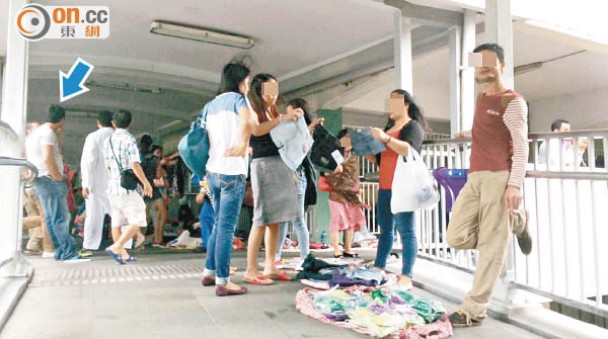
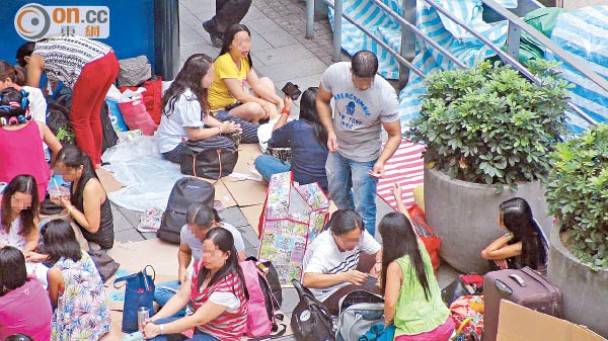
On Sundays and other holidays, a large
number of foreign domestic helpers congregate in Central and Admiralty. More
than one hundred South Asian hawkers and peddlers show up to sell clothing,
handbags, battery chargers, etc. Over the course of several Sundays, our
reporter has been observing these South Asian hawkers working in Battery
Path, Chater Road, the Murray Road pedestrian overpass and Worldwide House.
The hawkers are well-organized. They show up shortly after 7am, using vans
to carry many nylon bags of merchandise to the various locations. The
hawkers place their merchandise on large cloths so that they can pick up and
leave immediately.
The hawkers also post scouts around the
perimeter to watch for Food and Environmental Hygiene Department inspectors.
Our reporter observed one case in which more than a dozen inspectors came in
for a surprise raid but the hawkers were able to disperse quickly. The
inspectors were only able to confiscate one small bag of merchandise left
behind by a hawker.
According to one source, "There used to be
only ten or twenty South Asian hawkers. Now there are one to two hundred of
them. The Food and Environmental Hygiene Department has only about a dozen
or so inspectors." Therefore the odds are not in favor of the law
enforcement agents.
The source said that many FEH inspectors
have been injured during the course of law enforcement. Many of the South
Asian hawkers are refugees seeking political asylum in Hong Kong. They will
resist when facing arrest. "There was one time when they rushed over to
assault the inspectors in order to retrieve their merchandise. By the time
the police came, they had already fled."
(EJinsight)
November 13, 2015.
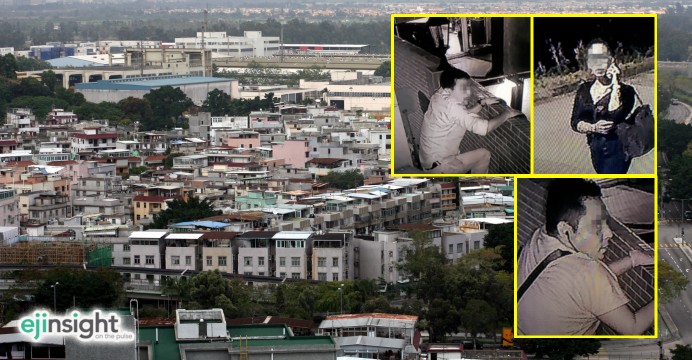
Police
arrested a former soldier from Colombia and two of his suspected accomplices
in Yau Ma Tei for a series of burglaries in the Northern district this year.
Over HK$1 million worth of stolen goods, including luxury handbags, watches
and a camera drone, were found in the suspectsÆ apartments, Apple Daily
reported on Friday. The trio
were said to be responsible for at least 22 burglary cases in the district
from June to November this year.
Investigation showed that the
suspected mastermind, a 28-year-old former soldier from Colombia, had been
arrested and imprisoned in Singapore for three years, also for burglaries.
After his release sometime in the middle of
this year, he came to Hong Kong and sought refugee status. He had been
granted recognizance. While waiting for determination of his status,
he teamed up with a 48-year-old Colombian and a 28-year-old Indonesian maid
to undertake a series of burglaries. The maid played the role of a lookout.
Yip
Kim-pang, senior inspector of the New Territories North regional crime unit,
said the suspects chose village houses in Tai Po and Yuen Long as targets.
Several victims posted CCTV video clips of the burglaries on Facebook after
calling the police.
(SCMP)
Why are Indians being targeted in Hong KongÆs crackdown on illegal
immigration? By Yonden Lhatoo. February 4, 2016.
How ironic that Hong KongÆs chief
executive, Leung Chun-ying, was in India this week with a big business
delegation to woo investors just as his administration was building a case
for imposing visa restrictions on the country.
Indians and nationals of other countries
from which asylum seekers have been flocking to Hong Kong will have to
secure an entry permit online before coming here.
The impending prospect of no more visa-free
access across the board has alarmed the cityÆs Indian business community,
and many are already complaining it smacks of racism and discrimination.
When asked about it directly in Mumbai,
Leung replied: ôWe want to make Hong Kong as barrier-free as possible, but
we are also mindful of, if you like, the side effects of providing visa-free
entry when we have issues of overstaying.ö
According to the government, Hong Kong is
now saddled with a backlog of nearly 11,000 refugee applications that need
to be screened. Some 80 per cent of them are from South or Southeast Asian
countries, with Vietnam leading the pack at 21 per cent, and India and
Pakistan following closely at 19 per cent and 18 per cent respectively.
From March 2014 to the end of 2015, an
average of 134 Indian nationals lodged asylum claims every month û a 13-fold
increase over the monthly average of 10 in 2013.
ItÆs obvious that many asylum seekers from
India landing on our shores are ôeconomic refugeesö seeking to earn money,
rather than real victims of torture or persecution back home.
Adding to a recent spate of reports about
groups of visitors from the subcontinent claiming asylum after arriving in
the city, the authorities on Wednesday gave details of what appears to be a
particularly brazen case.
Immigration officers arrested two Indian
Hong Kong residents running a local sports club after seven members of a
hockey team they had invited from India overstayed their visas and then
applied for asylum. The seven did not even play hockey here.
Looking at all of that, a crackdown on
visas seems justified, but I canÆt help feeling thereÆs a rather unhealthy
focus on lawbreakers from the subcontinent in particular these days. One
Chinese newspaper this week reported seven crimes involving South Asians
over a three-day period. If you go looking for xenophobically charged
angles, youÆll manage to find them.
The authorities intercepted 36 illegal
immigrants from India in 2010 û last year it was about 32 a month. At the
same time, they intercepted 190 a month from Vietnam, which is the source of
the biggest (non-Chinese) illegal immigrant demographic.
Perhaps when Vietnamese commit crimes,
theyÆre not as noticeable as Indians because they can blend in better with
the crowd. Or most of them are quietly employed as illegal labour.
LetÆs not forget that illegal immigrants
are exploited by unscrupulous brokers who profit from their desperation.
These days there are organised rackets
providing one-stop shops for illegal immigration to Hong Kong, complete with
legal services to take full advantage of procedural loopholes that allow
people to remain here for years while their applications are being vetted.
And there are employers in Hong Kong who are quite happy to recruit workers
from the black market labour force they provide.
ThereÆs plenty that the government can do
to tackle the problem at source, starting with clearing up that backlog.
IÆm just not sure about collective
punishment, though. Visa restrictions will put off genuine visitors and
disturb commerce.
Internet comments:
- The influx of asylum-seekers
is Hong Kong is allegedly due to the existence of full-service groups. The
groups will organize everything for the asylum seekers, from fake travel documents to
airplane tickets to lawyers already present at the airport when they land in
Hong Kong. After that, the petition process will go on for years with judicial
reviews all the way. This is just a racket for a certain group of
Hong Kong lawyers.
- The
question at heart is the position of the numerous South Asians in Hong Kong,
and this touches upon Hong Kong Localism.
Here is the easy way out:
(Timeout.hk)
July 1, 2015.
Marcus Lau,
editor-in-chief of The Undergrad, the Hong Kong University StudentsÆ
UnionÆs news source ... said: ô[Localism] is not a far-right, fascist
approach stating that only pure, ethnic Hongkongers can be counted. Anyone
who embraces the values of Hong Kong and identifies themselves as being
from Hong Kong can be counted as a Hongkonger.ö
But read on ...
(MediumRaW.org)
The impact of the Localist Movement on Hong Kong. February 12, 2014.
If the Hong Kong people should attempt to exude its right to
self-determination by way of the political theory of localism, we would need
to ... consider the question: Who constitutes Hong Kong people and are we a
ôpeopleö?
Unfortunately, there is no settled definition of ôpeopleö under
international law, but we can consider two possible alternatives: (1)
Hong Kong people are those who are so designated as Hong Kong
permanent residents under
Article 24 of the Basic Law or (2) Hong Kong people are those
who share a common language and culture, which would readily display
the difficulty in answering this question.
(1)
Hong Kong people are those who are so designated as Hong Kong
permanent residents under Article 24 of the Basic Law
This definition seems extremely tempting since it purports to have
legal backing. Unfortunately, pursuant to Hong Kong courtsÆ
interpretation of this Article, this definition would expand to PRC
citizens who have little connection with Hong Kong. By including these
individuals in the definition of Hong Kong people, we would undermine
the meaning and the spirit of localism as a justification for sourcing
sovereignty in Hong Kong people in order to make a political stand
against the PRC government.
(2)
Hong Kong people are those who share a common language and culture
This definition seems also rather simple and effective,
since it would provide adherents to localism a theoretical stance
against the PRC government (i.e. since Hong Kong people and mainland
Chinese do not share a common language and differ in ôculture,ö we are
not the same people). However, here, we are also faced with several
hurdles. First, ôChinese cultureö is very much entrenched in our
society, it may be difficult to articulate how the culture of Hong
Kong people and those of the mainland differ. Second, perhaps the more
difficult hurdle, is that this definition paints a very homogenous
picture of Hong Kong and rejects the multicultural and diverse aspect
of our city. Hong Kong is a multicultural and diverse society with
Cantonese and English as its languages. If we were to define Hong Kong
people based on a common language (for example, Cantonese) and culture
(for example ôChinese cultureö), we would disenfranchise other
participants who have significantly contributed to our society.
From the above, we can already see that because localism hinges on the
definition of ôHong Kong people,ö which remains undefined, localism
lacks strong theoretical support, which may result in it having a
negative effect to Hong KongÆs political development. The fact that
ôHong Kong peopleö is ill-defined is, I would submit, localismÆs
AchillesÆ heel as a successful political theory.
To
this date, many societies still struggle to consider what its people is
composed of and what characteristics its people should bear. For example,
United State continues to struggle with this issue. Recently, American
society was divided over Coca-ColaÆs advertisement (http://www.youtube.com/watch?v=443Vy3I0gJs),
which displayed Americans of different ethnicities and backgrounds with
the ôpatrioticö song ôAmerica the Beautifulö sung in various languages in
the background. Some Americans responded to this advertisement negatively,
suggesting that the song should be sung in English and that American
society was not multicultural or diverse. Thus, these questions, identical
to those that need to be resolved by our own society, are being debated by
the American people to this date.
The
American solution to this question, or at least for those who consider the
United States to be a multicultural and diverse society, is interesting:
the American people is comprised of those who subscribe and adhere to the
values embodied in the United States constitution, which includes the
American Bill of Rights. This basis is effective from a theoretical
standpoint but it also practically entrenches the United States
constitution in its people. This solution transforms the criteria needed
to join American society from one which is ethnically or culturally based
to one which allows anyone who is willing to subscribe to its values to
participate.
This
solution could readily be applied to Hong Kong. Could Hong Kong people be
defined as those which subscribe to the values of the Hong Kong people
defined in the Basic Law, which would allow anyone to join our society as
long as they so subscribe? I would consider that to be a very good start.
If you argue that Hong
Kong is meant to be for Hong Kong people with their own culture and values,
then you need to define both "Hong Kong people" and "Hong Kong culture and
values."
Hong Kong people should
be defined as "those which subscribe to the values of the Hong Kong people
defined in the Basic Law"? Let's start with
Article 1 of the Basic Law: "The Hong
Kong Special Administrative Region is an inalienable part of the People's
Republic of China." That's a no-go already.
And what about defining Hong Kong culture?
Wan Chin said that the new Hong Kong City-State will be based upon a
Renaissance of orthodox Chinese culture in opposition to the contemporary
mainland Chinese culture which has deviated from orthodoxy. According to his
approach, South Asians have no place in Hong Kong culture, because the
ancient Chinese don't even know anything about South Asia and its peoples.
If you modernize it, it becomes a copy of the Chinese Communist ethnic
policy, which is anathema.
Hong Kong localism is said to be an
unfinished political theory because "Hong Kong people" and "Hong Kong
values" are undefined as yet. It wasn't so hard in the cases of the people
of Catalunya, QuÚbec
or Scotland. So there must be something intrinsically hard about the case of
Hong Kong. Any test definition should include a stress test: What happens to
South Asians in Hong Kong?
- "The
American people is comprised of those who subscribe and adhere to the values
embodied in the United States constitution, which includes the American Bill
of Rights"?
How
ignorant can you get?
(U.S.
Citizenship and Immigration Serivces)
To become a citizen
at birth, you must
- Have been born in
the United States or certain territories or outlying possessions of the
United States, and subject to the jurisdiction of the United States; OR
- had a parent or
parents who were citizens at the time of your birth (if you were born
abroad) and meet other requirements
To become a citizen
after birth, you must:
- Apply for
"derived" or "acquired" citizenship through parents
- Apply for
naturalization after a foreign citizen or national fulfills the
requirements in the Immigration and Nationality Act.
In addition, members
and veterans of the U.S. armed forces and their dependents may be eligible
for special naturalization provisions.
If you were born in the
United States, you are automatically a citizen and you are not forced to
take any oaths or pledges. You can even dedicate your life towards
overthrowing the Constitution/Bill of Rights. The government can send you to prison for treason but
it
can't strip you of your citizenship. If you are an immigrant, you will have to take a
citizenship oath (see, for example,
YouTube) during naturalization.
If you want an oath of
loyalty implemented for citizenship in the new Hong Kong City-State, you
will encounter two sets of problems.
Firstly, some of those who were not
born in Hong Kong will refuse to pledge allegiance to the Basic Law (e.g
because they object to the existing
Article 1 or oppose your new Article 1 that replaces the People's Republic
of China with the Republic of Hong Kong). What will you do? Ship them all
back to their country of origin? Is the receiving state willing to
accept them? If not, you will have to hold them indefinitely or send them to
a third country willing to accept them.
Secondly, some of those
who were born in Hong Kong will refuse to pledge allegiance to the Basic Law
for whatever reason. What will you do? You don't even have anywhere to
deport them because Hong Kong is their homeland. You may have to beg
mainland China to accept them. Or you can just put them in a boat and push
it off shore to drift.
In Hong Kong right now,
there is no such oath of allegiance to the Basic Law. People can even burn
copies of the Basic Law in front of television cameras.
- I once attended a research conference in
Hong Kong in which four persons delivered papers in English on the Hong Kong
Internet. During the Q&A period, one Hong Kong audience member complimented
a presenter for having good local knowledge in spite of being a South Asian.
The South Asian presenter pounded his fist on the table and roared back in
Cantonese: "What do you mean!? I was born in Hong Kong, I have lived here all
my life, I attended school here from kindergarten to university and I read,
write and speak Cantonese flawlessly like any local. Why do you treat me as if
I am a chihuahua which miraculously managed to learn human language?"
- The second clearest
and loudest slogan after "I want genuine universal suffrage" that came out
of Occupy Central/Umbrella Revolution is "Nobody represents me." This meant
that neither the Occupy Central Trio nor the students organizations nor the
pan-democratic politicians were able to exercise any command/control over
the movement. That's great for theoretical democracy but it also guarantees
that nothing could be accomplished in practice for lack of any set of goals
that everybody could agree upon. Any proposal floated to the masses will be
objected to by somebody or the other, and thus rejected because it would be
undemocratic otherwise.
In like manner,
somebody is not going to want the Basic Law as it stands. See these Basic
Law bonfires:
- (Apple
Daily @YouTube, June 5, 2015; (Apple
Daily @ YouTube, June 6, 2015) Representatives from four
university student unions ripped up copies of the Basic Law and set fire
to it. The Victoria Park audience applauded.
- (NOW
TV @YouTube) July 1, 2013. Civic Passion rally.
- (Shuo
Online @YouTube) July 1, 2013. Legislator Raymond Wong Yuk-man in
front of the China Liaison Office.
- (DDTV
@YouTube) July 1, 2012. People Power in front of the China Liaison
Office.
You may think that all you need to do is to
tinker with the Basic Law a little bit and it will all work out quickly. You
are wrong. You can get started today. You will be very busy getting nowhere
for several more decades until it all becomes moot in the year 2047 when One
Country Two Systems officially ends.
- The valiant warriors of the Hong Kong
Localists admire the South Asians greatly. Here are some valiant actions by
South Asians.
- (Apple
Daily @ YouTube June 28, 2015, also longer version at
YouTube) This is a top favorite. Two South Asian males went by Tai
Nan Street in Sham Shui Po district and were attacked by almost 20 other
South Asians wielding knifes and sticks. The police tried to intervene but
the South Asians were completely oblivious of their presence and kept on
with the attack.
- (Apple
Daily @YouTube September 24 2015) At the Jordan MTR station, nine
armed South Asian men attacked three South Asian men with knives. The
attackers fled after 30 seconds of action.
- (Bastille
Post @YouTube March 3, 2015) Eight South Asians encountered four
other South Asian males in Chi Kiang Street, To Kwa Wan district. After
some verbal invectives, knifes were produced by one side. The other side
used wooden poles, iron bars and even flower pots to counterattack.
Meanwhile an intoxicated/drugged young lady wandered onto the scene by
chance and the
police had to subdue her as well.
(Oriental
Daily, December 20, 2015) A 32-year-old South Asian was previously
assaulted by seven South Asian men in Chi Kiang Street, To Kwa Wan
district and robbed of a $300 mobile phone and $10,000 in cash. Today at
1:45am, the man encountered the same seven South Asians in an underground
tunnel near the Happy Valley cemetery. The man called the police
immediately. When the police arrived, they found the man injured on the
ground whereas the seven attackers had already fled.
- (Headline
Pop News @YouTube July 10 2015) A South Asian male pours water on
a Chinese man sitting outside a 7-11 convenience store. Another South Asian
male assures the Chinese man that the water fell down from upstairs.
- (YouTube
March 2015) 58-year-old peddler manager dies in Central after struggle
with unlicensed South Asian peddler.
- (YouTube
March 3 2015) South Asian man who was banging on a glass partition punched
a police officer nine times in Chung
King Mansions, Tsim Sha Tsui district.
- (YouTube)
May 4, 2013 10:53pm melee at the Lung Wai Game Center, Mong Kok
- (YouTube)
South Asian male swings a right-handed punch at a Hong Kong male in the MTR subway
- (YouTube)
South Asian gang boxing
- (Oriental
Daily) December 20, 2015. Three masked South Asian men entered the
7-11 convenience store in Yuen Long at 3am, threw orange powder at the
attendant and declared a robbery. The attendant could not open the cash
register quickly enough, so the three assaulted him for three minutes. The
men took $3,300 from cash register and fled through the back door. The
attendant called the police. The police came to look at the surveillance
video. It was noted that the three men came earlier to make purchases and
scout the location. So the police spread out through the area, and
arrested the three men in the park.
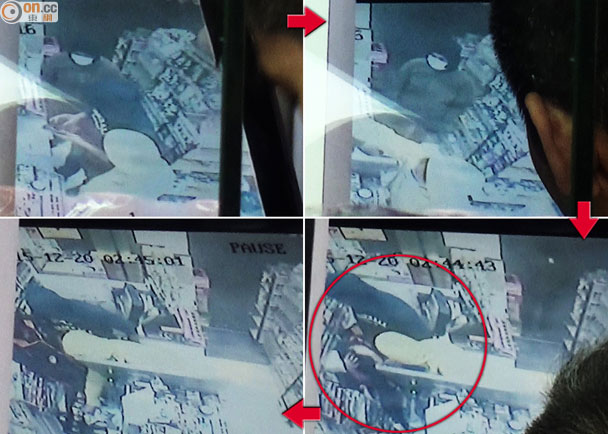
(The incident was also reported at
EJ Insight)
- (Oriental
Daily with video) January 31, 2016. A South Asian man snatched a
Samsung mobile phone from a 23-year-old woman across Yuen Long Plaza at
00:45, and fled down Castle Peak Road.
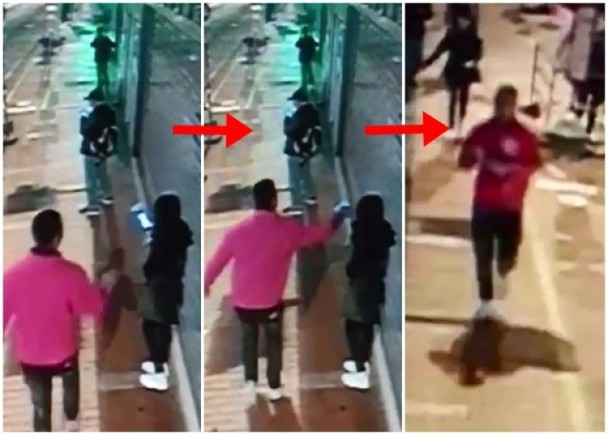
- (Oriental
Daily) January 31, 2016.
At 7:00 am yesterday, a North Point
garage owner was going to work carrying the $100,000 payroll when he was
assaulted by four masked South Asians who took his money.
At around noon, a 49-year-old man named Wong and his wife went by 182 Sai
Yeung Choi Street South when six South Asian men came near them. Two of
them touched Wong's pants. The six then left. Shortly afterwards, Wong
realized that the $19,000 cash in his pant pocket was missing. His wife
called the police. The police believed that the six were a gang with four
of them acting as decoys while the other two cleaned Wong's pocket. The
police were unable to find the suspects.
At 2:00pm yesterday, three South Asian males and one South Asian woman
ambushed a man outside a money-changer and took away 10,000 RMB.
- (Oriental
Daily) January 6, 2016. A South Asian male was walking near Lai Lo
House, Lai Kok Estate, Sham Shui Po district when about 10 men rushed and
attacked him knifes and rods. The victim was injured multiple times and
ran 200 meters along Lai Chi Kok Road through Lai On Estate to reach the
Sham Shui Po Police Station for help. He left a long trail of blood behind
him. The Police called an ambulance to take the man to the hospital. The
Police are investigation the case.
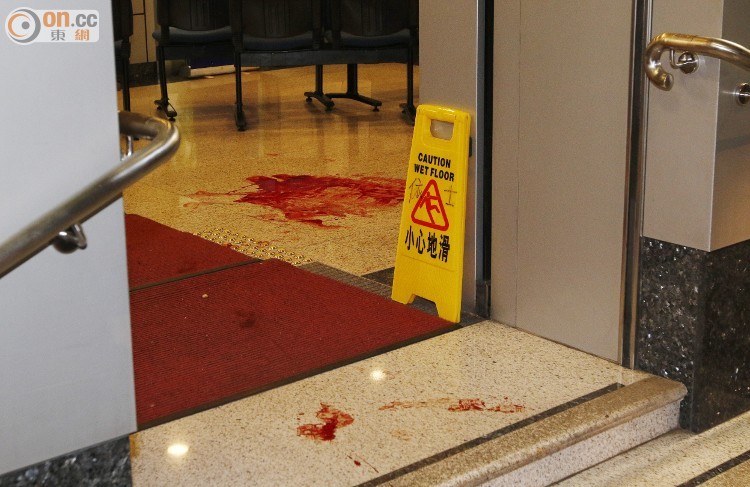
- (Oriental
Daily) January 10, 2016. At around 6pm, a bearded
50-something-year-old South Asian male holding a can of beer walked into a
convenience store on Tai Po Road, Sham Shui Po district. He pulled out a
6"-long knife and threatened the male service worker to open the cash
register. The man took about $4,500 in cash and fled. The police were
called and they are investigating.
- (Oriental
Daily) January 11, 2016. At around 11pm last night, three masked
South Asian men holding iron rods charged into a car-washing shop on Hok
Yuen Tung Road, Hung Hom district. There were three workers present at the
the time. The three picked out a 50-something-year-old male worker and
attacked him without saying anything. Then the three men fled. The police
were called. The victim said that he does not have any enemies and he has
no idea why he was attacked. The police are investigating.
- (Oriental
Daily) January 11, 2016. Based upon a tip for a gang fight, the
police arrested 24 Hong Kong males aged 13 to 25 in Tin Wah Estate, Tin
Shui Wai district around 11pm on January 9 for unlawful gathering. The
police also stopped a white van and arrested 7 South Asians aged 12 to 32
and confiscated four hockey sticks, two baseball bats and four brass
knuckles. These individuals are suspected of unlawful gathering and
possession of weapons.
- (Oriental
Daily) January 12, 2016. Last night at 8pm, a 49-year-old went by
229 Queens Road East (Wan Chai) and encountered a compatriot aged between
30 and 40. The other man got excited and attacked the first man with a
12-inch knife. The police are investigating the case.
- (Headline
Daily with video) February 3, 2016. On Wednesday night, a Hong
Kong woman met a friend in Tsim Sha Tsui during which she received
$58,000. The transaction was observed by a South Asian male. As the Hong
Kong woman left, the South Asian male snatched her envelop of money and
fled. The woman gave chase while calling for help. Some men standing
outside a bar heard her and stopped the man. The South Asian man kept
saying "Sorry, sorry." The South Asian man is a 23-year-old from Pakistan
on an asylum claim.
- (Oriental
Daily) February 6, 2016. Yesterday around noon, a Pakistani man
who was suspected of casing to steal from parked cars was intercepted by
the police. He took out a pair of scissors and attempted to stab the
police and flee. He was subdued by the police. Afterwards he cursed out
the police and then he wrote down in tears and begged the police to let
him ago. He was arrested for resisting arrest and carrying an attack
weapon. According to information, the 40-year-old Pakistani man came to
Hong Kong to seek political asylum from torture. He allegedly slept under
a bridge in Yau Ma Ti district. In 2014, he became a member of a South
Asian criminal syndicate and took party in various crimes such as criminal
intimidation, passing counterfeit currency, burglary, drug possession,
making false testimony etc.
- (Oriental
Daily) February 6, 2016. Early this morning at the Southeast
Building, 475 Hennessey Road, Causeway Bay, two Indian asylum seekers fell
to blows over money. One intoxicated man attacked the other man with a
fruit knife. The other man was slashed in the face, and also bitten on his
left arm. He retaliated and caused the first man to bleed in the face.
Afterwards, the slashed man fled to the building lobby where the security
guard called the police.
- (Oriental
Daily) February 7, 2016. At around midnight, a group of South
Asian men were sitting on the fence of Tai Kok Tsui Road and Ivy Street
when a dispute broke out. A 19-year-old Indian asylum-seeking man was
attacked by two compatriots wielding a ten-inch knife. He used his hand to
block the blows and sustained injuries on his left hand. Other compatriots
called the police.
- (Oriental
Daily) February 7, 2016. At 186 Yu Chau Street, Sham Shui Po
district, there had been a dispute between the newly opened foot-bathing
service shop and three South Asians who moved the furniture in for them.
At 3am this morning, someone poured liquid into the store and set off a
fire. Three women were sleeping inside the shop at the time. They fled
through the back door and called the police.
The South Asians show our indigenous Hong
Kong revolutionaries just what can be achieved by acts of bravery and valor.
Even the Hong Kong Police are scared of the South Asians. That is the kind
of respect that our indigenous Hong Kong revolutionaries want to get too.
- (Oriental
Daily) List of all crimes committed by South Asian/African asylum
seekers during 2016 so far:

- The valiant warriors of the Hong Kong
localist movement would prefer to stick to harassing mainland Chinese women
and children:
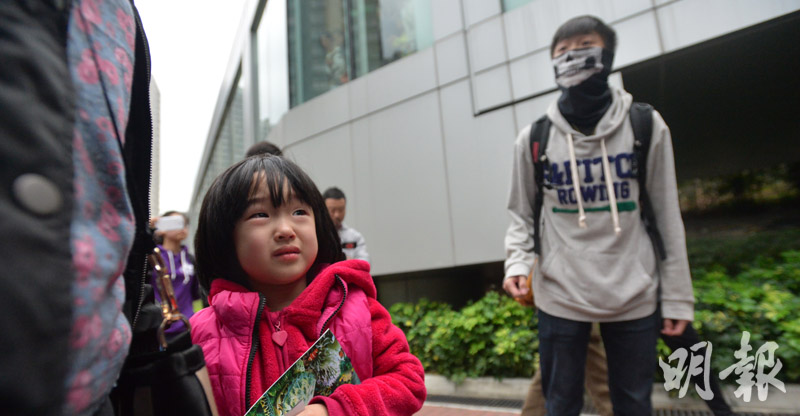
It is not safe to confront South Asians (see, for example, (WarmWaterFrog
@YouTube October 22, 2014) A South Asian male dismantled Occupy Mong
Kok barriers and stabbed a demonstrator.)
- When the mainland Chinese parallel
traders pick up their merchandise in Sheung Shui to bring back across the Lo
Wu border crossing, the Hong Kong localists said that this must stop in
order to bring peace and tranquility back to Sheung Shui.
When the South Asian domestic helpers take over the streets in Central and
Causeway Bay on Sundays and holidays, the Hong Kong localists suddenly don't
care about peace and tranquility in local communities anymore.
When the mainland Chinese women sang and
danced on Sai Yeung Choi Street South, the Hong Kong localists said that
they are causing noise pollution and therefore this must stop.
When the South Asians sang and danced on Sai Yeung Choi Street South (see
YouTube), the Hong Kong localists suddenly don't care about noise
pollution anymore.
When the mainland Chinese singers accepted
donations from passersby on Sai Yeung Choi Street South, the Hong Kong
localists insist that the local ordinances (against begging) must not be broken.
When the unlicensed South Asian hawkers sell their merchandise in the
streets of Central and Causeway Bay on Sundays and holidays, the Hong Kong
localists suddenly don't care about local ordinances (against unlicensed
peddling) anymore.
When the mainland Chinese migrants arrive
and receive public welfare payments, the Hong Kong localists said that their
money must not be wasted this way.
When the South Asian asylum seekers arrive and receive public welfare
payments, the Hong Kong localists suddenly don't care about how their money
is being spent anymore.
When the mainland Chinese show up and
commit crimes, the Hong Kong localists said that criminals must be prevented
from coming to Hong Kong.
When the South Asians show up and commit crimes, the Hong Kong localists
suddenly aren't concerned about crime anymore.
When the mainland Chinese display their
traditions and cultures, the Hong Kong localists said that only authentic
pure Hong Kong culture is allowed.
When the South Asians display their traditions and cultures, the Hong Kong
localists suddenly aren't concern about the purity and authenticity of Hong
Kong culture anymore.
So it was never about peace, tranquility,
noise pollution, law enforcement, public welfare, crime, culture, tradition
or values. It was just a case of raw racial/ethnic discrimination against
the mainland Chinese.
The point here is not to say that the Hong
Kong localists should be practicing discrimination against the South Asians
in addition to the mainland Chinese. The point here is say that if you want
to practice racial/ethnic discrimination against the mainland Chinese, just
do so directly without couching the whole campaign under the any number of
other reasons (peace, tranquility, blah blah blah). You will only be caught
with serial contradictions in your positions.
(Hong
Kong Free Press) Pro-democracy parties top list of æmost prominentÆ
political groups, says HKU survey. November 4, 2015.
The Association for Democracy and PeopleÆs
Livelihood, The Civic Party and the Democratic Party are the most popular
amongst the ten most prominent political groups in Hong Kong, according to a
HKU Public Opinion Program (HKUPOP) survey released on Tuesday. However,
none of the ten parties on the list have an approval rating of higher than
50 points out of 100.
The survey, which was conducted via
telephone in October, first asked interviewees to name ten political groups
they were most familiar with. The second stage involved asking respondents
to rate the political groups using a 0-100 scale.
Results show that pro-democracy parties
dominate the first three spots out of the ten on the list, with the ratings
of Civic Party (CP) and Democratic Party (DP) going up five positions each
to rank 2nd and 3rd. The Association for Democracy and PeopleÆs Livelihood (ADPL)
tops the list.
Overall, the support ratings of most
political groups have gone down, with the approval ratings of The Democratic
Alliance for the Betterment and Progress of Hong Kong (DAB), New PeopleÆs
Party (NPP), The Hong Kong Federation of Trade Unions (FTU) and Hong Kong
Confederation of Trade Unions (HKCTU) seeing a most significant drop.
The support ratings of the NPP,
which is chaired by Regina Ip Lau Suk-yee, dropped to a record low since the
founding of the party in 2011, but it has also replaced the Labour Party on
the list by entering the ranks of the top ten for the first time. The other
nine political groups retained their positions since the last
survey, which was conducted during April and May this year.
(HKU
POP) November 3, 2015.
POP conducted a double-stage
survey on the rankings of the top 10 political groups in October 2015 by means
of random telephone surveys conducted by real interviewers. The top political
groups listed in our latest survey were all those who obtained highest
unprompted mentions in our first stage naming survey conducted from October 12
to 17. In that survey, respondents could name, unaided, up to 10 political
groups whom they knew best. Democratic Alliance for the Betterment and
Progress of Hong Kong (DAB), Democratic Party (DP), Liberal Party (LP), Civic
Party (CP) and Hong Kong Federation of Trade Unions (FTU) were mentioned most
frequently. The 12 most frequently mentioned political groups then entered
into the second stage rating survey. During that second stage survey conducted
from October 19 to 23, respondents were asked to rate each political group in
turn using a 0-100 scale. 0 indicates absolutely no support, 100 indicates
absolute support, and 50 means half-half. After calculation, the bottom 2
political groups in terms of recognition rate were dropped, leaving behind the
top 10.
(Hong
Kong Research Association)
1,115 citizens age 18 or over
were interviewed by telephone on October 19-26 2015. The respondents were
asked to rank political parties which hold legislative council seats according
to 1=very much not support; 2=not support; 3=half/half; 4=support; 5=very much
support.
The two surveys have different
scales (0-100 versus 1-to-5). But we can apply a linear transformation to the
HKRA data to make it comparable to the HKUPOP data. Here is the formula: If a
political party has an average HKRA rating of X, then its HKUPOP-equivalent
rating is (X-1) x 25.
For
example, if the average HKRA rating is 5 (maximum score), then its HKUPOP
rating is (5-1) x 25 = 100.
For example, if the average HKRA rating is 3 (median score), then its HKUPOP
rating is (3-1) x 25 = 50.
For example, if the average HKRA rating is 1 (minimum score), then its HKUPOP
rating is (1-1) x 25 = 0.
The results are as follows:
|
Political Party |
HKU-POP Rating |
HKRA Rating |
|
Association for Democracy and People's Livelihood |
46.7 |
36.8 |
|
Federation of Trade Unions |
46.2 |
36.8 |
|
Liberal Party |
45.2 |
37.3 |
|
Labour Party |
45.2 |
28.8 |
|
Democratic Alliance for Betterment and Progress of Hong Kong |
44.2 |
38.3 |
|
Democratic Party |
43.7 |
30.5 |
|
Civic Party |
42.2 |
30.0 |
|
New People Party |
38.5 |
40.8 |
|
League of Social Democrats |
37.0 |
27.5 |
|
People Power |
35.6 |
28.3 |
|
The correlation coefficient
between the two columns of numbers is 0.71.
Here are some notes about the
survey results:
-
The average rating is higher
when the 0-100 scale is used than when the 1-5 scale is used.
-
Both surveys agree that the
two radical parties (League of Social Democrats and People Power) have the
lowest popular support.
-
The HKRA survey puts the four
major pro-establishment parties (NPP, DAB, FTU and Liberal Party) at the
top.
-
The HKRA survey puts the the
three major pro-democracy parties (Civic Party, Democratic Party and Labour
Party) near the bottom.
How can the two surveys diverge
so much from each other? Where do the biases creep in? There are three
possibilities.
(1) The HKRA is correct
whereas the HKUPOP is biased in favor of the pro-democracy camp. If you
don't like the pro-democracy camp and you get a call from HKUPOP, you slam
the phone down. Thus, the HKUPOP is only polling its pro-democracy
supporters.
(2) The HKUPOP is correct
whereas the HKRA is biased in favor of the pro-establishment camp.If you
don't like the pro-establishment camp and you get a call from HKRA, you slam
the phone down. Thus, the HKRA is only polling pro-establishment supporters.
(3) The HKUPOP is biased in
favor of the pro-democracy camp and the HKRA is biased in favor of the
pro-establishment camp. If you don't like the pro-democracy camp and you get
a call from HKUPOP, you slam the phone down. If you don't like the
pro-establishment camp and you get a call from HKRA, you slam the phone
down. Thus, the partisan polling organizations are only polling their own supporters.
Of course, their poll results will be quite different then.
How to distinguish among the
possibilities? Technically, this can be done by getting the two polling
organizations to field a question such as: How would you describe your
political leanings? (1) Lean towards the pan-democrats; (2) lean towards the
pro-establishment camp; or (3) lean towards the middle. And then compare the
results from the two polls. For example, HKUPOP has conducted such a poll for
Path of
Democracy:
Table 3:
28.4% lean towards the pan-democrats
11.4% lean towards the pro-establishment camp
41.9% lean towards the middle
15.6% no political leaning/political neutral/not belong to any camp
2.7% Don't know/hard to say
HKRA does not provide such
information.
Another way of looking at this
is through the response rates. If both polls have 95% response rate, they must
have very high overlap in their respective coverages. But if one or more poll
has poor response rate, then they could be polling a biased portion of the
population.
HKRA uses automated telephone
methodology, so they can't even come up with a response rate. HKUPOP claims a
66.8% response rate for this poll. Case closed? Not so quickly. HKUPOP's
Path of
Democracy discloses the details behind the HKUPOP response rate
methodology. Here is one problem:
Unable to ascertain if
telephone number is qualified
1159 busy signals
10601 no pick-up
1376 telephone message recording
54 password block
343 language barrier
502 interviewee broke off contact during selection stage
5 other telephone line problems
Telephone numbers which were
determined to qualify but interview could not be completed
2 family members declined to be interviewed
6 respondents declined to be interviewed
9509 unable to complete interview within survey period
27 failed to complete entire interview
6 other problems
Total 9550
Total number of completed
interviews
1010
Response rate = (completed
interviews) / (completed interviews + incomplete interviews + qualified but
refused to be interviewed) = (1010) / (1010 + 502 + 27 + 2 + 6)
The 9509 cases of ("unable to
complete interview within survey period") are not involved in the response
rate formula. When someone is called, says that he/she is busy, agrees to a
callback appointment but never picks up, it is a more polite refusal than
slamming down the phone immediately but it is still a refusal. According to
international standards (for example,
American Association of Public Opinion Research, p35),
RR5 = 1010 / (1010 + 2 + 6 +
9509 + 27 + 6) = 9.5%.
That is not good at all. And
this is before we get into the issue about allocating a portion of the 10601
"no pick-up" as refusals too, as many people will look at the caller ID first
and won't pick up any unfamiliar numbers.
In addition, these surveys are
actually hard for ordinary people to answer. Unless you are a political
junkie, you don't know what these political parties have been up to
individually. For example, if you ask the question: "I am going to read you a
list of 12 political parties. Can you please tell me who is the current
chairman/chief/head of each organization?" Only a very small percentage of the
respondents will get everything right. So what is the point of asking people
about political parties that they are not familiar with?
(Hong
Kong Free Press) November 2, 2015.
Last week Commercial Radio broadcast a
tape of Arthur Li urging the Council of the University of Hong Kong not to
appoint Johannes Chan. The governmentÆs media defenders swung swiftly into
action. ôNo smoking gun or incriminating remarks,ö said the SCMPÆs Alex
Loà ôWe know all this already,ö he concluded. In the Standard, Mary Ma
said the content of the leaks had ôalready been reportedö, and ôthe bomb
is more of a dud.ö
Just a minute. The content of the leaks
had certainly been reported already. It was reported by Billy Fung, the
student representative on the Council, now much-abused for breaching the
councilÆs confidentiality. But we did not ôknow all this alreadyö because
we were also told of Arthur LiÆs response, which was that ôBilly Fung is a
liar.ö So those of us who supposed that Professor Li might approach normal
standards of integrity and truthfulness in public life were left with two
conflicting stories. It seems we are now to conclude that, at least as far
as Mr Lo and Ms Ma are concerned, Professor LiÆs rebuttal of the initial
leak was of no significance at all. They did not believe it. Professor Li
now says that when he said Mr Fung was a liar he meant that he had
breached the confidentiality rule.
But that is not what his hearers would have
understood by the remark. The normal and natural meaning of the words was
that Mr FungÆs version of events was erroneous. I realise that Professor Li
is a serial foot-in-mouth artist who is, as Ms Ma tactfully put it, ônot the
type to embarrass easilyö. But it seems even his warmest supporters do not
place much faith in what he says. This seems rather a disadvantage in a
university councillor, let alone a council chairman.
But of course the university has no voice
in the selection of its council chairman, which is a matter for the
government. I share the pessimism of those who see no real prospect of
local universities either shaking off their government appointees or
divesting themselves of the automatic Chief Executive-Chancellor. But this
seems to be taking the wrong approach anyway. The government has a
legitimate role in appointing people to university councils, and indeed to
many other bodies. The question is not whether there is a justifiable
right to appoint, but whether that right is being misused.
The answer to the second question is yes.
Leung Chun-ying was the first Chief Executive to recruit a politically
appointed assistant for the specific purpose of polluting the government
nomination machinery with politics. The government appoints hundreds of
people to all kinds of courts, councils and advisory bodies. These
appointments should be made on merit with a view to keeping up the quality
of the deliberations of the bodies concerned.
Instead they are being used as a
political reward system, and a sort of social security for superannuated
members of the pro-Beijing party, the Democratic Alliance for the
Betterment and Progress of Hong Kong. This is a drastic change for the
worse which was never publicly acknowledged, defended or explained. I
expect it was the Liaison OfficeÆs idea. It is no wonder that our
government has a tin ear for public sentiment. It spends too much time
listening to its friends tell it how wonderful it is. This is a chorus in
which the local media are increasingly willing to join. This is a recipe
for long-term problems. If you canÆt get any attention from the government
without starting a riot, then riots there will be.
(EJinsight)
Why Arthur Li should not be appointed HKU council chairman. By Ip Kin-yuen.
October 30, 2015.
Edward Leong is due to step down as
chairman of the University of Hong Kong (HKU) council on Nov. 6, along with
five members whose terms expire. These departures could lead to a major
overhaul of the council.
Chief
Executive Leung Chun-ying is reportedly set to appoint Executive Councilor
Arthur Li, an incumbent council member, to succeed Leong. If the reports are
true, we could have another howling controversy on our hands. The HKU Alumni
Concern Group called a press conference on Oct. 25, in which it gave three
key reasons Arthur Li is not a suitable candidate.
Reason
1: High-handedness
Dubbed the ôeducation czarö when he
headed the Education and Manpower Bureau from 2002 to 2007, Arthur Li was
notorious for his ruthless suppression of the autonomy of our tertiary
institutions. He once tried to force the Chinese University into merging
with the Hong Kong University of Science and Technology. On another
occasion, he threatened to get Fanny Law, then permanent secretary for
education and manpower, to cut student quotas for the Hong Kong Institute
of Education unless it agreed to merge with the Chinese University. He
also demanded that the institute reprimand lecturers who opposed the plan or
pay the price.
Reason
2: Grudge against HKU
Arthur Li is widely known in the
education sector for his grudge against HKU. In a July interview, HKU pro
vice chancellor Cheng Kai-ming told Ming Pao Daily that Li had asked
donors not to make any contribution to the university during his term as
education and manpower chief.
Reason 3: Conflict of interest
As we all know, Arthur Li and incumbent
pro chancellor David Li come from the same prominent family and both serve
in the family business. It takes very little to figure out why people
would find this arrangement inappropriate.
Unless
Leung Chun-ying intends to declare war on higher education and deepen social
divisions, he should not appoint such a controversial figure as Arthur Li to
be the next HKU council chairman for the sake of the long-term interest of
the university.
(EJinsight)
November 4, 2015.
The University of Hong Kong (HKU)
could see protests erupt on campus if Arthur Li is named the new head
of the universityÆs governing body, a student leader has warned.
HKU Student Union president Billy
Fung said Tuesday that students will definitely take action if Li
takes the chairmanÆs post at HKU Council after its current chief
Edward Leong steps down Friday.
Fung did not reveal specific plans, but said that ôsky is the limitö
for potential protest action, Apple Daily reported. Any moves deemed
feasible by students will not be ruled out, said Fung, who is himself
a member of the universityÆs governing body.
The comments came amid rumors that Li is the first choice of Chief
Executive Leung Chun-ying to take over as the HKU CouncilÆs new chief.
Rosanna Wong Yick-ming, another Council member who has also been seen
as a possible successor to Leong, is unfit for the post as well, said
Fung. Wong is in the same league as Li when it comes to extreme views,
the student leader said.
(EJinsight)
November 6, 2015.
ItÆs official. Arthur Li and Monique Ho are dating. ThatÆs according
to HoÆs boss, Digital Broadcasting Corp. chief Loh Chan. And just in
case there was a problem with conflict of interest, Loh made the
revelation in the spirit of corporate disclosure.
Li has been a major source of news in recent days thanks to a leaked
recording of his remarks about Johannes Chan, and Ho works for a media
company. Most news about a blooming romance is something to cheer
about, so we hear that Li is happy about it and we understand.
But some netizens are not so forgiving. They were quick to point out
the gaping age difference between the 70-year-old former education
minister who could be the next chairman of the University of Hong Kong
council and the charming lady executive in her forties.
ôFather-daughterö is a trending topic on social media.
Some students turned the tables on Li who once famously described them
as ônot particularly academically giftedö but love to look like
ôheroesö to their girlfriends. ôIf they [students] can stand out, wave
banners and shout slogans, they could look like heroes, couldnÆt they?
I think thereÆs a certain attraction in that,ö Li said.
Loh got the scoop after Ho told him about the relationship 18 months
ago. Six months earlier, Li had lost his wife, Diana Chester, to
cancer. Now that itÆs all in the open, the romance is causing some
awkward moments for the couple. They have been seen being chased by
the paparazzi in and out of Cyberport where both work.
Not that itÆs any of our business but itÆs worth mentioning that older
men dating younger women isnÆt news the way a man biting a dog is.
Successful academics are known to relearn the ABC of romance deep into
their seventies or eighties. And younger women are attracted to older
men because they see something in them they donÆt often find in many
younger men ù stability and maturity.
So all is fair on that count but we couldnÆt resist giving concrete
examples, so here you are.
Dr. Franklin Yang, a Nobel Prize co-winner in physics, was 82 when he
married his wife, then 28. Yang, pushing 94, describes his wife as a
gift from heaven, his ôlast gift from Godö.
Then thereÆs Lawrence Lau, Arthur LiÆs successor as vice chancellor of
the Chinese University of Hong Kong. Lau is married to Ayesha Abbas, a
partner in an accounting firm. Lau is 70, Abbas is 50.
Those who have never experienced this
kind of relationship or canÆt imagine themselves being in one will
take some doing to understand people like Arthur Li and Monique Ho.
But does it even matter?
Internet comments:
- With respect to the Ip Kin-yuen/HKU
Alumni Concern Group reasons against Arthur Li,
Reason 1: High-handedness -- This is only
going to gain points with the public because they want someone who is more
decisive. Meanwhile, the Lingnan university vice-chancellor and board
chairman are losing points because they were kowtowing to a small number of
exceedingly rude students.
Reason 2: Grudge against HKU -- Li asked
donors not to make any contribution to HKU? How many donors did Li ask? Ten?
A hundred? A thousand? This is silly, because Li doesn't have the
wherewithal to reach out to all potential donors and make an appeal. The
bigger question is: How many potential donors have withheld their donations
because of the actions of Ip Kin-yuen and the HKU Alumni Concern Group (such
as laying siege to HKU council members after the July meeting)?
Reason 3: Conflict of interest -- this sort
of thing happens all the time and is simply handled by Li saying: "As the
matter pertains to my brother David Li, I recuse myself from all discussions
and voting due to a perceived conflict of interest." How much of the
council's business concerns David Li? Not much.
- (Bastille
Post) So who is in the running for HKU council chairman?
Rosa Yeung Tse-tse is well-esteemed. In
1947, Yeung entered the HKU Medical School as a 16-year-old. After
graduation, she continued to work at HKU and Queen Mary Hospital until her
formal retirement in 1999. She is now 84 years old. If Arthur Li Kwok-cheung
is opposed because he is 70 years too old, Yeung is even older. In that
case, it is better to keep 76-year-old Edward Leung Che-hung in the job.
Lo Chung-mau does not appear to want this
post, because he prefers to be developing innovative surgery procedures. He
might be interested in become vice-chancellor, though.
Rosanna Wong Yick-ming is indistinguishable
from Edward Leung Che-hung. But HKU Students Union president Billy Fung has
already declared Wong to be an extremist just like Arthur Li and the
students will take unspecified actions if Wong is appointed.
In conclusion, there is no one left except
for Arthur Li Kwok-cheung.
- (SCMP)
By demanding it all, University of Hong Kong activists may end up with
nothing. By Alex Lo. November 7, 2015.
I am losing track of the demands student
activists and pan-democratic politicians have made in the sorry saga of
Johannes Chan Man-mun and his failed appointment to a top post at the
University of Hong Kong.
The latest has some HKU students,
teachers, staff and alumni planning to carry out a campus-wide vote on
whether its governing council should reveal the reasons for rejecting the
former law dean for the job. They are also demanding guarantees from the
chief executive that he will not appoint council member Arthur Li Kwok-cheung
- a former education secretary and head of Chinese University - to be
council chairman.
Meanwhile, the HKU student publication
Undergrad has applied to be an interested party to the gag order obtained
by the council following the audio leaks of its members' discussions about
Chan.
On a broader front, university activists
and practically the entire pan-democratic camp are demanding changes to
existing laws that automatically make the chief executive the head or
chancellor of the seven tertiary institutions. The role of the chancellor
is largely ceremonial. But he does have the power to appoint council
chairmen and some council members. The activists have even argued that
this limited power amounts to a threat to academic freedom and autonomy.
As you can see, it's a long list of demands. I am sympathetic to some of
them, but highly sceptical about others.
On Chan's rejection, we know pretty much
everything from the unauthorised leaks. So what more can we learn?
At times, the students and their
supporters act like they simply want to undermine the council and its key
decisions and functions. As for the chief executive being the head of
universities, it involves complicated legal and constitutional issues as
well as long-standing practices.
Our young freedom fighters are being
overly ambitious and reaching beyond their grip. They will end up
polarising the entire HKU campus and other universities.
This is a lesson they should have learned
from the Occupy debacle but clearly have not: by demanding everything, the
activists will end up getting little or nothing.
- (Speakout
HK) November 5, 2015. Education legislator Ip Kin-yuen says that
Arthur Li hates Hong Kong University. Of course, he doesn't have to
produce any evidence. If he says so, then it must be so. In 2006, Education and
Manpower Bureau chief Arthur Li wanted to merge the Institute of Education
with the Chinese University of Hong Kong. At the time, the Education and
Manpower Bureau permanent secretary Fanny Law wanted to fire four
trouble-making lecturers, one of whom was the same Ip Kin-yuen. Later the High
Court found that the government officials had not interfered with academic
freedom. In any case, Ip Kin-yuen quit teaching, joined the Professional
Teachers Union and became a politician. I have more reason to believe that
Ip Kin-yuen hates Arthur Li than the latter hating Hong Kong University.
(SCMP)
October 31, 2015.
The University of Hong Kong has obtained
what one legal expert called an "all-encompassing" court order to ban media
reports detailing information leaked from its governing council. It secured
the injunction yesterday, hours after Commercial Radio aired the second of
two audio clips in three days that apparently revealed a pair of council
members criticising liberal scholar Professor Johannes Chan Man-mun behind
closed doors over his bid for a managerial post.
The radio station, which was named in the
order alongside "persons unknown", said it had removed the clips from its
website but pledged to "uphold freedom of speech and of the press and the
public's right to know, and to protect any source". Critics feared the
injunction "threatened" media freedom in the light of public interest and
concerns about possible government interference in the operations of the
city's top university.
In a statement last night, HKU said the
order covered Commercial Radio and "persons unknown" who had "appropriated,
obtained or à intend to offer" confidential information about the council's
meetings. These parties must not use, publish, communicate or disclose to
any other person materials including any audio clips, agenda, papers and
minutes of the council. They were also barred from publishing any
information that might identify any HKU members, including council members,
staff and students.
The matter would return to court on
November 6.
Eric Cheung Tat-ming, a lawyer and HKU
lecturer, described the order as "all-encompassing". "It is aimed at
forbidding any more disclosure of leaked files and confidential information
that will identify a particular council member," he said. "But if there is
litigation, the court should take into account the public interest in HKU
issues."
To Yiu-ming, a journalism professor at
Baptist University, called HKU's application for the injunction "stupid and
unwise". "This will threaten freedom of the press," To said. "Recently, the
press has effectively monitored the HKU council, which is a public trustee
to run the university."
HKU turned to the courts as revelations
surrounding Chan's failed job application for pro-vice-chancellorship
continued to grip the institution.
The two recordings involved HKU council
member Leonie Ki Man-fung and former education chief Arthur Li Kwok-cheung,
both aired on Commercial Radio, were of the same September 29 meeting. The
recordings were made during a council meeting at which a search committee's
recommendation to appoint Chan was voted down. Critics see political motives
for that decision.
Ki was among four people appointed by Leung
to the council on Friday, including Sino Group executive director Daryl Ng
Win-kong, actuary Patrick Poon Sun-cheong and accountant Edward Chow
Kwong-fai - deputy to the Zhejiang chapter of the Chinese People's Political
Consultative Conference.
(SCMP)
November 1, 2015.
Controversy surrounding the University of
Hong Kong's court order banning media revelations of its council meetings
grew yesterday, as the Sunday Morning Post learned HKU had also
issued a summons to a radio station seeking a declaration that its airing of
audio clips was "in breach of confidence". As well, the university once
demanded that Commercial Radio tell it who had leaked the two clips,
according to legal correspondence sent last week.
Following on the heels of the
correspondence were HKU's dual actions of securing the injunction and
issuing the summons, both made on Friday to clamp down on recordings of a
confidential council meeting in September that voted down liberal scholar
Professor Johannes Chan Man-mun's candidacy for a key management position.
The legal challenges were piled on
Commercial Radio after it broadcast the pair of clips, in which council
members Professor Arthur Li Kwok-cheung and Leonie Ki Man-fung appeared to
be speaking.
Behind closed doors in court, HKU
submitted, among other evidence to back its injunction application, a post
on the Facebook page of HKU students' union president Billy Fung Jing-en
that revealed discussions among his fellow council members, according to
legal documents seen by the Post. A full hearing will be held this
Friday to further debate the interim injunction.
The university did not mention the summons
- in which it also demanded the station pay its legal fees - in its media
release two days ago, when it published part of the injunction order.
HKU council chairman Dr Leong Che-hung
conceded he did not seek the views of other members before applying for the
injunction, citing a need to "safeguard the university's dignity".
Concerns over press freedom were raised as
media outlets other than Commercial Radio were quick to retract part of
their coverage of the clips in response to the court order.
The Journalists Association hoped the court
would take into account freedom of speech, while an alumni group led by
lawmaker Ip Kin-yuen was considering making itself a party in the upcoming
hearing so it could argue against the injunction.
HKU's statement also did not mention this
part of the injunction order: "For the avoidance of doubt, nothing in this
order shall prevent the defendants from publishing, communicating or
disclosing such of the information à as was already in or that thereafter
comes into the public domain of Hong Kong."
The order covered Commercial Radio and
ôpersons unknownö who had ôappropriated, obtained or à intend to offerö
confidential information about the councilÆs meetings. These parties must
not use, publish materials including audio clips, agenda, papers and minutes
of the council. They were also barred from publishing information that might
identify any HKU members, including council members, staff and students.
Commercial Radio would not comment on inquiries because of ongoing judicial
proceedings. An HKU spokeswoman said a reply was not immediately available.
Professor Chan Yuen-ying, director of HKUÆs
journalism and media studies centre, called on both the council and Johannes
Chan to agree to release all council files, including documents, minutes and
other materials related to his nomination and appointment. ôChan should
waive privacy rights while the council should waive confidentiality
stipulations, considering that the personnel matter has become a huge matter
of public interest,ö the director said.
(EJinsight)
November 2, 2015.
A court order banning media from
disseminating the content of leaked recordings of a meeting of the
University of Hong Kong council Sept. 29 makes an important exception, a
legal scholar says. The exception is for material that has already been
broadcast or published and so forms part of the public domain, Eric Cheung
Tat-ming, a principal law lecturer at HKU said on a radio program Monday
morning. These include the two recordings broadcast by Commercial Radio last
week, Ming Pao Daily reported. HKU did
not mention the exception in the press release it issued on Friday
announcing it had obtained the temporary injunction.
Commercial Radio had broadcast audio
recordings of council members Arthur Li Kwok-cheung and Leonie Ki Man-fungÆs
speeches during the meeting, at which the council rejected the unanimous
recommendation of the university search committee for the appointment of
former law dean Johannes Chan Man-mun as a pro vice chancellor. Other media
outlets, including EJ Insight, subsequently published excerpts of the
transcripts.
The Hong Kong Journalists Association and
seven other media associations are staging a protest against the court order
at HKU Monday. An online petition has been launched to gather support from
journalists and teachers and students at local journalism schools.
Serenade Woo Lai-wan, Asia-Pacific project
manager for the International Federation of Journalists, said she was
shocked when she first learned about the gag order. She said the media is
only fulfilling its legitimate duties in disclosing matters pertaining to
the public interest. ôThe court order clearly threatens the core values of
Hong Kong as regards press freedom,ö Woo said. She called on all journalists
to keep tabs on the incident and defend their rights.
The Hong Kong News ExecutivesÆ Association
issued a statement expressing concern that the injunction could harm the
free flow of news. The association called for the court, which is scheduled
to hold a hearing Friday on whether to make the injunction permanent, to
balance the right to information of the public with the HKU councilÆs
confidentiality principle.
HKU said in a statement Sunday night that
it respects the freedom of speech and of the press. It said the measures it
took were meant to protect those rights.
(SCMP)
November 2, 2015.
Seven groups of journalists and teachers
today urged the University of Hong Kong to withdraw a court order which bars
the media from disclosing discussion of the universityÆs council meetings.
Shouting slogans, representatives from the group gave a petition letter to
an officer of the university today. The groups included the Hong Kong
Journalism Association, the Hong Kong Press Photographers Association, the
RTHK Programme Staff Union, the Next Media Trade Union, Ming Pao Staff
Association, the Independent Commentators Association and Journalism
Educators for Press Freedom. They said the injunction obtained by HKU dealt
a severe blow to press freedom, and deprived the public of the right to know
about an important decision by the HKU council.
The injunction bars media organisations
from releasing audio recordings, papers and discussions of the HKU council.
It came after Commercial Radio last week aired two audio clips featuring two
council members discussing the appointment of law scholar Professor Johannes
Chan Man-munÆs bid for a senior managerial position.
Hong Kong Journalists Association
vice-chairwoman Shirley Yam said the injunction sought by HKU smothered the
media from reporting issues of interest to the public. ôIt set a very bad
example. If other organisations follow suit in the future, the public will
not be able to know important information,ö she said. Yam said the
association was seeking legal advice to decide whether to make a plea when
the matter returns to the High Court on Friday.
(SCMP)
November 2, 2015.
Scholars at the University of Hong Kong
expressed shock over its legal action to summon Commercial Radio to court
and over the incomplete disclosure of the injunction order, as revealed by
the South China Morning Post.
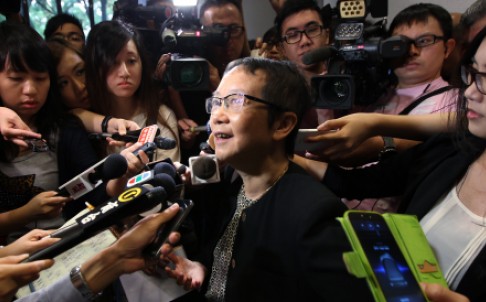
HKU was acting out of "utmost stupidity"
when its lawyers sent Commercial Radio a letter requesting the identity of
the source of the audio leak prior to seeking the injunction, said Professor
Chan Yuen-ying, director of HKU's journalism and media studies centre. "It's
common sense that news media will not disclose their sources," Chan said.
In the letter, HKU asked the radio station
not to play the confidential recordings in which council members Professor
Arthur Li Kwok-cheung and Leonie Ki Man-fung were heard opposing the
appointment of liberal scholar Professor Johannes Chan Man-mun to a key
management position.
HKU's action - in which it also demanded
that Commercial Radio disclose who made the leak before the hearing on the
interim injunction last Friday - sparked concerns of a threat to freedom of
the press, after the Post revealed that the university omitted at
least two references to its action from its press release: the fact that it
was to send a court summons to Commercial Radio, and a key part of the
injunction order stipulating public-domain exception.
The latter was an important clause because
it would define the obligations of other media, said Eric Cheung Tat-ming,
principal law lecturer at HKU. "The public-domain clause means that other
media are not bound by the injunction in that they can continue to broadcast
the two recordings already in the public domain."
An HKU spokeswoman said last night it had
not yet delivered the summons, clarifying that it was seeking "costs"
instead of legal fees. On the allegation that the media release was an
incomplete version of the injunction, the spokeswoman said it was a summary
of the order "based on legal advice".
The Journalists Association also sent a
letter to HKU yesterday asking it to provide grounds for making the
application for the injunction; its written submissions made to the court;
and supporting documents lodged. It says it is seeking legal advice on
joining the petition against the application, as the injunction could "set a
daunting precedent on the protection of press freedom, which is enshrined in
the Basic Law".
Meanwhile, Dr Lawrence Lau Juen-yee,
husband of HKU council member Ayesha Macpherson, criticised the leaking of
confidential discussions, saying it was an "utterly despicable" act. In an
article published in the Post today, the former Chinese University
vice-chancellor says it was "certainly unethical" to record or broadcast
secret conversations.
(SCMP)
November 3, 2015.
The vice chancellor of the University of
Hong Kong has distanced himself from a decision by the chairman of its
governing council last week to seek a court order banning media revelations
of its meetings. "The council chairman took legal advice before applying for
the injunction; all inquiries should be directed to him," Professor Peter
Mathieson said yesterday in an emailed response to the South China Morning
Post, referring to Dr Leong Che-hung.
Leong had described the legal action as
"necessary to safeguard the university's dignity". He also said he had not
sought the views of fellow council members prior to the injunction
application, which the High Court approved on Friday. He turned to the
courts after Commercial Radio aired two audio clips purportedly of
confidential council discussions.
In his reply to the Post, Mathieson also
appeared to dismiss calls for a full disclosure of what was actually said in
a September 29 council meeting that voted down Chan's candidacy for
pro-vice-chancellorship.
"I support the principle of confidentiality
and deplore all the breaches thereof that have happened in the time I have
been in office," Mathieson said. He also commented on a mock referendum
among students, held last week, that overwhelmingly rejected the man in the
frame to succeed Leong - Professor Arthur Li Kwok-cheung, council member and
former education minister. Li, known as "the tsar" for his high-handed
style, is believed to be the choice of Chief Executive Leung Chun-ying,
HKU's chancellor. Leong is due to step
down as council chairman this Friday. "The appointment of the next chairman
of council is a matter for the chancellor," Mathieson said. "We await the
announcement."
(EJinsight)
November 3, 2015.
Freedom of the press is the embodiment of
the right of the people to express their views and receive information
freely.
Upholding the freedom of the press is far
more crucial than helping the bunch of hypocrites on the University of Hong
Kong council to save face.
It is also far more important than enabling
our High Court judges, who are so ignorant about modern human rights, to
save their face.
Anybody entrusted with public power should
be subject to criticism when they do not act in the public interest,
including our judges, especially when their decisions infringe the basic
human rights and freedom to which every citizen of this city is entitled.
As the ôfourth branch of governmentö, the
media is under a moral obligation to strongly criticize our judges for their
wrong decisions and awaken them to the implications of their mistakes for
society.
How strong can such criticism be?
In 1987, the British newspaper Daily Mirror
was outraged by the injunction granted by three judges of the Court of
Appeal prohibiting any media coverage of Peter Wright, a former MI5
counterintelligence agent, and the contents of his book Spycatcher, which
revealed some serious institutional flaws inside the agency.
In protest, the newspaper published the
photos of the three judges upside down on its front page, along with a
headline that read: ôYou fools!ö
The fact that the media in Hong Kong is
still treating our judges so nicely and respectfully even when they make
mistakes in their decisions will only encourage them to do so.
In fact I feel compelled to point out that
some of the decisions made by our High Court judges in the past that
undermined our freedom of assembly and right to protest illustrate that they
not only lack common sense but are also completely ignorant about social
realities and the importance of upholding human rights.
As regards the recent injunction granted by
the High Court against the dissemination of audio recordings of the remarks
made by HKU council members during a meeting discussing whether to appoint
Professor Johannes Chan Man-mun as pro vice chancellor, it is a totally
wrong decision, because it directly violates our citizensÆ right to know.
Perhaps our local papers should also
publish the picture of the judge who granted that injunction upside down,
along with a headline that reads: ôYou fool!ö
In my opinion, the Hong Kong Journalists
Association should have staged a protest outside the High Court rather than
HKU.
They should also seek legal advice and be
prepared to go to any lengths to defend the publicÆs right to know,
including violating the law if need be.
Besides, the injunction itself is
completely meaningless, because it doesnÆt apply to the audio clips that are
already circulating in the public domain, such as on the internet, as some
in the legal sector have pointed out, let alone the countless transcripts of
the tapes that have already been read by hundreds of thousands of ordinary
citizens.
However, as the old joke about the bikini
goes, what it conceals is more interesting than what has been revealed.
What about the remarks made by other HKU
council members during that same meeting?
Is the media in possession of any more
tapes that have yet to be made public?
If the answer is yes, then is it willing to
ignore the injunction mistakenly granted by some High Court judge and air
the tapes in order to fulfill its role as social watchdog and defend the
publicÆs right to know?
The question here is, which in the
following should be given priority when it comes to information that
involves a huge public interest: upholding the publicÆs right to know,
defending the dignity of the press, or saving the face of some prominent
people on the HKU council?
I think the question is a no-brainer.
The fact that judges in Hong Kong have
independent and superior social status doesnÆt mean they are allowed to make
decisions that are totally out of touch with social realities.
They should also stay alert at all times to
any politically motivated attempt to use civil procedure as a tool to
undermine our freedom, as in the case of the HKU council.
After all, most judges in Hong Kong are
just a bunch of backward legal animals who have failed to keep up with the
times.
They are still stuck on the same level as
British judges in the 1970s and Æ80s and only understand the law literally
rather than having a real sense of what it really stands for.
Our media, too, has done a poor job in
providing effective oversight of our judges.
I really hope that before the appeal
against the injunction is heard by the court this Friday, more tapes will
come to light.
It might sound a bit disrespectful to the
judge who granted the injunction, but what our judges need is not respect
but education and a bitter lesson.
(SCMP)
November 5, 2015.
Commercial Radio has agreed to be bound by
an agreement with the University of Hong Kong not to publish any more
information about the HKU council. This means the radio station agrees not
to air previously leaked audio clips of council meetings, and also not to
air any more information about future council business. This undertaking
does not, however, affect other media û named as ôpersons unknownö in the
original injunction order. The impact on press freedom will remain to be
argued in tomorrowÆs hearing û if anyone will join the litigation as an
interested party.
High Court judge Godfrey Lam Wan-ho
expressed concern at the scope of the ban on future publication. ôMy concern
is that you are now seeking a perpetual injunction on all meetings, future,
past, and present,ö Lam told HKU counsel Clifford Smith SC in a hearing this
morning. ôI can see itÆs a little unusual.ö Lam cited the British case
Attorney-General v Times Newspapers Ltd, noting that the House of Lords
declined to grant a part of the injunction that would ban publication of
memoirs of any officers of the security service.
But since the radio station is not
contesting the conditions, the court will leave it to any possible
interested parties to argue against this point, Lam said. So far three
people have indicated to HKU they might contest, but no formal application
has been made yet, according to solicitor for HKU Brian Gilchrist.
After the hearing, counsel for Commercial
Radio Mike Lui insisted his client was ônot backing downö. ôWe are still
upholding press freedom. The client has already served public interest by
airing the clips so that the public are not misled over the issue,ö Lui
said. Commercial Radio's withdrawal could mean the injunction on it - and
also on other media organisations - could "last forever", lawyers said, if
no other party joined the litigation and if the court did not change its
order.
Two sources with knowledge of the matter
earlier told the South China Morning Post that the radio
station, which earlier vowed to protect press freedom, told HKU in writing
yesterday that it would not attend the court hearing set for tomorrow. "The
management think they should not spend time and resources contesting the
order," one of the sources said. "Having aired two leaked audio clips of the
council meetings, the station considers it has served the purpose of
informing the public."
The Journalists Association would decide
today whether to join the lawsuit as an interested party, chairwoman Sham
Yee-lan said. "The scope of the court order is too broad," Sham said. "The
court has the duty to clarify what it means and how it will strike a balance
between protecting the HKU council's confidentiality and public interest in
HKU matters."
Last Friday, HKU obtained an interim
injunction to ban the radio station and "persons unknown" from publishing
information about its business, including papers and audio recordings of its
meetings. The radio station aired two audio clips from a council discussion
during a closed-door meeting in September. After that meeting, council
chairman Dr Leong Che-hung said the council had voted down the appointment
of pro-democracy scholar Professor Johannes Chan Man-mun to a senior
managerial post, but he declined to explain why.
Barrister Ronny Tong Ka-wah SC said he was
"disappointed" at the radio station's decision. If no party was joining the
case, the injunction would "last forever" and "it will be very bad for press
freedom", he said. The media would still be able to report council records
already in the public domain, but they could be accused of contempt of court
if they reported confidential information provided by council members on an
off-the-record basis, Tong added.
HKU principal law lecturer Eric Cheung Tat-ming
said the court should treat the Journalists Association the same as the
radio station if it decided to join the case, because other media would face
similar consequences if the order continued to be in effect. ôNo one would
know how political considerations û like licence renewal û came into play
[in the radio stationÆs decision],ö Cheung said.
(SCMP)
Get it straight - Hong Kong's self-styled democrats are always right. By
Michael Chugani. November 4, 2015.
For those unfamiliar with Hong Kong's
political playbook, Public Eye will provide an idiot's guide.
The first thing to remember is you're not
allowed to hold a different view from our self-proclaimed defenders of
democracy. Whatever they say or do is morally right by default. If you dare
challenge them in any way, you'll be mocked as a pro-Beijing stooge or,
worse still, derided as a "Leung fun", which means a fan of Chief Executive
Leung Chun-ying. If you refuse to cheer their missile-hurling, name-calling
and frivolous filibustering, you're on the wrong side of democracy. Don't,
for heaven's sake, say you genuinely support democracy but feel the 79-day
occupation that paralysed key districts was the wrong way to achieve it.
Only those who backed Occupy are true democrats. All others are Beijing
bootlickers.
You must applaud the person who leaked
audio clips of a confidential University of Hong Kong council meeting as a
heroic whistle-blower. A whistle-blower is a person who exposes illegal or
immoral activities. But the leaked audios exposed no wrongdoing. Having an
opinion is fine, but only if you agree at all times with the self-proclaimed
defenders of democracy. They wanted Professor Johannes Chan Man-mun, an
Occupy supporter, as HKU pro-vice-chancellor. All those who opposed his
appointment are shoeshiners who must be exposed. Even though the leaked
material contained no smoking gun, it must still be regarded as a Watergate
moment. Anyone who exercises his right to seek a court injunction against
the leaks, as HKU Council chairman Leong Che-hung did, is muzzling the media
and deserves to be smeared.
Never mind that a judge independently
granted the temporary gag order ahead of a full hearing on Friday. In Hong
Kong's political playbook, using our independent judiciary to legally
challenge the so-called democrats is political persecution. But when the
so-called democrats use our independent judiciary to challenge "Leung funs",
it becomes a cherished right that must be protected.
You are not fit to be a university council
member if you had disagreed with Occupy or the storming of an HKU council
meeting by Chan supporters. The headlines will scream "CY appoints
pro-Beijing figures to council" as if academic freedom is doomed. Academic
freedom is safe only in the hands of those who storm council meetings, hold
members hostage, leak meeting details and backed Occupy and Chan as
pro-vice-chancellor.
Public Eye's
own playbook is succinct: we will never let anyone define our democratic
credentials. Anyone who tries can go stick it where the sun doesn't shine.
(Hong
Kong Free Press) Michael Chugani: Public eye or blind eye? By
TIm Hamlett. November 13, 2015.
Deary me, Michael ChuganiÆs efforts to
defend anything currently under attack from the forces of subversion have
left him seriously confused. In WednesdayÆs Pravda he did not seem to know
whether he was coming or going, but manfully trying to do both at the same
time.
First out of the box we had ôWhereÆs the
smoking gun from the HKU Council leaks?ö. This was devoted to the view that
the leaks from the CouncilÆs debate on Johannes Chan reveal nothing
improper, and therefore the ôwhistleblowerö, which we may take it refers to
Billy Fung though he is not named, is a coward and a phoney. This is a
rewritten version of Mr ChuganiÆs piece in the Standard a few days before,
where it masqueraded as advice on the correct use of English but made much
of the same points, with the modest exception that in that article Mr Fung
was a ôtraitorö and a ôsnitchö. Friends of Mr Fung may be tempted to retort
at this point that Mr Chugani would have a more accurate view of the world
if his head was not stuffed so far up the part of the governmentÆs anatomy
that rhymes with farce. But let us not get personal.
Mr ChuganiÆs is a coherent position, even
if you do not agree with it. If there was no foul, there should be no
whistle. Personally I think Mr Chugani is applying the wrong standard. The
Council is justified in over-ruling the search committee if some item of
knowledge known to the Council but overlooked by the committee places the
matter in a new light. But none of the speeches offered anything new. In its
hours of work on the subject the search committee certainly considered such
matters as the candidateÆs research record and qualifications. For amateur
part-time Council members to over-rule the experts on the basis of nothing
more than their own prejudices or a bit of superficial Googling was arrogant
and indefensible. This would still be the case if they were not in any way
influenced by politics, though you have to be rather optimistic to believe
that.
Anyway having established the councillorsÆ
innocence to his satisfaction Mr Chugani moves on to ôRadio station airs
one-sided view of council meetingö. Here we meet Commercial Radio and
consider its broadcasting of tapes of two membersÆ speeches on the Johannes
Chan matter. Mr Chugani wonders why there were no broadcast speeches from
people on the other side of the argument. Well, we may hazard a guess that
variations on ôI think we should accept the proposal of the properly
appointed search committeeö would not have made very interesting radio. But
Mr Chugani thinks this made the broadcast ôselective airing of leaks that
smear one sideö. But, wait a minute. If there was no impropriety justifying
the blowing of the whistle then why should the broadcasting of the speeches,
whether selected or not, constitute a ôsmearö? To smear, as Mr Chugani will
no doubt be telling young Standard readers next week, is ôto sully, vilify,
or soil a reputation, good name, etc.ö
But if there is nothing wrong in the
speech, then the speakerÆs reputation presumably remains unsoiled. ôWhat did
the trio say that was illegal or immoral?ö asks Mr Chugani, with the clear
intention that we should answer ônothingö. But in that case there can be no
harm in radio listeners hearing the speeches. Broadcasting them may be a
breach of confidence but it cannot be a ôsmearö if there is no dirt, as Mr
Chugani staunchly maintains. I am irresistibly reminded of the Roman god who
had two faces pointing in opposite directions. His name was Anus à I beg
your pardon, Janus.
Mr ChuganiÆs third offering was a call for
housing to be built in country parks. CanÆt say I agreed with that either
but it was at least logical.
(SCMP)
November 6, 2015.
The High Court extended a gag order sought
by the University of Hong Kong yesterday to continue banning publication of
information about its governing council's discussion - though the time frame
it covered was curtailed. Some supporters of media freedom deemed the
revised interim injunction "acceptable", but the Journalists Association,
which joined the hearing as an interested party, urged HKU to drop its legal
action altogether.
The order, in effect until the next hearing
on November 24, now applies to "persons unknown" who possess information
about the five HKU council meetings held since June. It does not protect
future council business as the original order would.
Ip Kin-yuen, the education-sector lawmaker
who also joined the hearing as an interested party, voiced relief outside
court. "The scope of the ban is now much narrower," Ip said. "It is good for
press freedom and freedom of speech, and the development of HKU."
The current order was revised from one
issued last Friday that had banned Commercial Broadcasting and "persons
unknown" from publishing details about the council's business.
Council chairman Dr Leong Che-hung obtained
that order in HKU's name after the station aired two recordings of a
September closed-door discussion about democracy supporter Professor
Johannes Chan Man-mun's candidacy for a key managerial post that ended with
him being voted down. Critics said the council's move was politically
motivated.
In the two leaked clips, council members
Professor Arthur Li Kwok-cheung and Leonie Ki Man-fung were heard
criticising Chan's academic qualifications and personal integrity.
The revised order declares those two
recordings and their transcripts are already in the public domain and can be
published. The ban is now confined to information that has not yet been
leaked from the five council meetings between June 30 - the day Chan's
appointment was first discussed - and yesterday, as narrowed down by Mr
Justice Godfrey Lam Wan-ho and the interested parties. No audio recordings,
agenda or papers of those meetings must be published.
Besides Ip and the association, the
Chinese-language Apple Daily, HKU law student Mark Lee Hei-shun and
Marcus Lau Yee-ching, chief editor of HKU student publication Undergrad,
joined the litigation yesterday. All five parties, sharing similar
arguments, opposed HKU's request to adjourn the case. They said the order
should instead be discharged because the plaintiff "has no authority" to
sue. Leong had said it was his own
initiative to seek legal help and fellow council members were not consulted,
they noted. "We looked up the HKU Ordinance - only the council collectively
could instruct counsel and solicitors to act for the university," Martin Lee
Chu-ming SC, for Apple Daily, said. They also said HKU had failed to
disclose key information to the court, including the principles of
accountability and openness enshrined in the code of conduct for council
members.
Student union president Billy Fung Jing-en
showed up as an observer. After the hearing, Ip said Leong, whose term
expired last night, had "left behind a mess for HKU".
(Hong
Kong Free Press) November 6, 2015.
The High Court has decided that the
injunction applied for by the University of Hong Kong (HKU) prohibiting the
publication of leaked recordings of a closed-door governing Council meeting
will continue until the next hearing. However, the scope of the injunction
has been narrowed to only cover the content of meetings starting from June
30 2015.
On Friday afternoon, the judge ruled that
the injunction will only prevent recordings and documents of council
meetings in the period of June 30 to November 6 from being published. Those
who breach the terms of the injunction will be brought in as second
defendants to the case.
With regards to the two recordings
featuring speeches made by Council members Arthur Li Kwok-cheung and Leonie
Ki Man-fung during the meeting on September 29 already published by
Commercial Radio last week, as well as comments made by student leader Billy
Fung Jing-en following the meeting that day, they will be included under the
public domain exception and their publication will not be bound by the
injunction. The idea of ôpublic domainö is also understood to extend beyond
Hong Kong.
The court will adjourn on November 24.
Last Friday, HKU obtained an interim
injunction, forcing Commercial Radio to remove recordings of speeches by the
two Council members during a controversial session on September 29 in which
the governing body rejected the appointment of former HKU law dean Johannes
Chan Man-mun as pro-vice-chancellor of the university. The interim
injunction has drawn widespread criticism, with seven media unions
protesting the decision and starting an online petition. On Thursday,
Commercial Radio and HKU reached a consensus in the High Court, with
Commercial Radio agreeing not to republish the two leaked recordings of the
Council meeting.
(SCMP)
November 13, 2015.
The University of Hong Kong's governing
council has endorsed its former chairman's action last month to seek a
controversial gag order that bans media publication of the council's
business. It also names council member Abraham Razack as its temporary
spokesman until a chairman is appointed. The lawmaker will set the agenda
for the next meeting and handle emergency matters as well.
The leadership vacuum is caused by Chief
Executive Leung Chun-ying, who, contrary to expectations, has not yet named
a successor to council chairman Dr Leong Che-hung after the expiry of his
term on November 6.
It is believed that Leung wants to appoint
Arthur Li Kwok-cheung but is treading cautiously because of public
opposition to the former education minister known for his high-handed style.
Razack said last night after a council
meeting that members had agreed to support Leong's injunction application,
made without prior consultation with them. He said: "We support this because
Dr Leong has done the right thing according to our rules. He needed to
safeguard our principle of confidentiality, making sure all council members
can speak what they want to say. This is legally and morally justified."
They would discuss what to do about the order after the next court hearing
on November 24, the same day when the council would meet again, he added.
HKU treasurer Margaret Leung Ko May-yee,
who chaired yesterday's meeting as a member, said if no chairman was
forthcoming in the meantime, they would have to elect a chairman meeting by
meeting.
Two weeks ago, Leong applied for the
interim injunction in the name of HKU after Commercial Radio aired two audio
clips of confidential talks in September in which the council voted down
pro-democracy scholar Professor Johannes Chan Man-mun's candidacy for
pro-vice-chancellorship. Critics see the council's move as politically
motivated.
That order was all-encompassing, banning
the station and "persons unknown" from reporting details of all council
meetings, past and future. It plunged HKU deeper into the mire, rocked as it
already was for months by Chan's appointment issue and donation claims
against Occupy founder Benny Tai Yiu-ting.
Opponents of the order told the court Leong
had acted beyond his powers as chairman. In that hearing, the scope of the
ban was narrowed down to cover only the five council meetings held since
June, where Chan's candidacy was discussed. But the order did not stop a
third clip - featuring member Rosanna Wong Yick-ming criticising Chan -
emerging on a Taiwanese website two days later.
The council's student representative, Billy
Fung Jing-en, voiced "great disappointment" at the government's delay in
naming a new chairman. He said leaving the post vacant would be a "very
severe blow" to HKU.
(SCMP)
End the charade: University of Hong Kong gag order serves no purpose. By
Alex Lo. November 28, 2015.
To make a mistake is only human, said
Cicero, but to persist in it is idiotic.
I am sure somewhere on the august campus of
the University of Hong Kong, the great Roman orator is still being taught,
perhaps even in the original Latin. Those who now run the university council
should take a lesson. They are persisting in court to extend an interim
injunction that the council sought to prevent details of its meetings being
revealed to the public.
But what's the point of applying a gag
order when the public pretty much knows everything about the crucial meeting
of the governing council where members voted against the appointment of law
don and pro-democracy supporter Johannes Chan Man-mun to a top post? Isn't
it time for the university to stop?
While the lawyers are still bickering
before a High Court judge, another recording - the fourth leak so far- of
the key closed-door meeting in September was uploaded to Taiwanese online
forum PTT. The existing gag only covers Hong Kong.
The latest had HKU chief Peter Mathieson
standing by Chan while council member Professor Lo Chung-mau criticised Chan
as an academic lightweight. Well, we know all this already. But some people
may still find it entertaining to listen to the actual voices.
It was Dr Leong Che-hung, the hapless
former chairman of the council who applied for the initial gag order on his
own authority. But his term has expired, and Chief Executive Leung Chun-ying
has yet to appoint a replacement.
Council members can therefore reasonably
blame Leong for the public relations fiasco and halt the court proceedings,
which have achieved nothing and in fact have been counterproductive in
exposing the governance crisis at the city's oldest university.
The argument that calling off the gag order
would encourage future council members not to respect their confidentiality
pledge doesn't hold water. People feel the need to leak or become a
whistleblower because there is a controversy brewing and those dealing with
it are perceived not to be addressing it adequately or fairly.
Such leaks are the effect, not the cause,
of a crisis. There is no point trying to gag the messenger when the horse
has already bolted.
Internet comments:
- This is awfully embarrassing. The Hong
Kong University issued some press release about a court injunction and seven
major media organizations are up in arms. They called for a mass
demonstration and eight persons showed up to present a letter to the Hong
Kong University in front of the media (=their colleagues). Then it turns out that they never
bothered to check the fine print: "For the avoidance of doubt, nothing in
this order shall prevent the defendants from publishing, communicating or
disclosing such of the information à as was already in or that thereafter
comes into the public domain of Hong Kong." Their entire protest about
infringement on freedom of press just got blown to smithereens. The most
important function of the media is not to take dictation but to conduct
independent verification. In this regard, these media have failed miserably.
- Of course, the media empire struck back by accusing Hong Kong University
of not telling them about it in the first place.
- Pity that Now TV reporter who tried to
secretly take courtroom photos of the seven policemen who allegedly assaulted Kenneth
Tsang. The reporter was caught and his photos removed.
If only the reporter was not caught, the photos would be plastered all over
the Internet for a major media coup for the sake of the
people's right to know. Contempt of court? Fuck that!
- (HKG
Pao) Here is the inside story about what happened. In the beginning,
the anonymous person offered to provide the audio recordings. At Commercial Radio,
Stephen Chan Chi-wan is the Chief Executive Officer who also hosts his own
show. So when he said to air the audio recordings, nobody dared to object.
Even the senior management was unaware. After the first recording was aired,
there were some internal objections but the senior management did not
issue any directives. So Stephen Chan decided to air the second recording,
also without consulting senior management.
Hong Kong University obtained a temporary
court injunction, and then senior management saw what was happening. Their
view is that Chan's program is not a news program so that this has nothing
to do with freedom of press. The senior management settled with HKU and
promised not to do anything more along the similar lines. This way, they
avoided legal costs and the loss in advertising income.
After this episode, senior management is
taking an unfavorable view of Stephen Chan. They felt that Commercial
offered shelter to Chan after he was forced out of TVB for bribery.
Recently, Commercial Radio stood by Chan through the appeal by the
Department of Justice. However, Chan is angry that he has now be found to be
guilty in the bribery case and he wants to take revenge against the
government through airing the audio recordings. Senior management is angry
that Chan would use their radio station to exact personal revenge.
(The
Stand) October 30, 2015.
The Hong Kong University
Students' Union held a referendum on two motions. A total of 5,353 students voted at a
turnout rate of 33.2%. There were 5,316 valid ballots and 37 invalid ballots.
The turnout rate was more than the 10% as required under the student union
by-laws, so these two motions now represent the official positions of the
student union.
Motion No. 1
The post of Chairman of the Council of the University of Hong Kong must be
filled by a candidate who is acceptable to the members of its teaching
staff, non-academic staff and students.
There were 5,119 YES votes, 110
NAY votes and 87 abstentions.
Motion
No. 2
Arthur Li Kwok-cheung is not suitable to hold any position under the
governance structure of the University of Hong Kong.
There were 4,785 YES votes, 178
NAY votes and 353 abstentions.
(Oriental
Daily) November 5, 2015.
The Hong Kong University Alumni Concern
Group and the Hong Kong Teaching Staff Union announced that they will be
holding a HKU Campus Voting Plan. The Hong Kong University Public Opinion
Programme will provide technical support and the Hong Kong University
Students Union will be a sponsor. The voting will be held Monday-Friday next
week. The motions are (1) expressing regret at the university council for
vetoing the candidate for pro vice-chancellor; (2) expressing no confidence
in university council chairman Leung Che-hung and other members for vetoing
the candidate for pro vice-chancellor; (3) declaring that Arthur Li Kwok-cheung
is not suitable to become university council chairman.
The Hong Kong University Convocation
Standing Committee announced that there will be another special meeting on
November 29 to discuss and vote on five motions. In the statement, the
committee also said that each such special meeting requires the investment
of manpower and financial resources and therefore they want to be cautious.
They have reflected these concerns to those alumni who want the special
meetings. However, their concerns were ignored. The committee said that if
these special meetings are abused, they may erode public trust in Hong Kong
University and the HKU Convocation.
(Ming
Pao) November 14, 2015.
The Hong Kong Convocation Extraordinary
General Meeting on November 29 will offer alumni four motions to vote on.
Those who cannot attend in person can authorize others to vote on their
behalf. In the previous EGM, there were more than 6,000 proxy statements.
Yesterday Hong Kong University Alumni
Concern Group convener Ip Kin-yuen issued "an emergency appeal" because they
have only 28 proxy statements so far. If too few people vote, the results
will not be persuasive.
The difference is that the proxy statement
last time requires only a signature and a listing of the authorizer's Hong
Kong ID number, but the proxy statement this time must be either submitted
in person to the Alumni Affairs Office with verification of ID or by asking
another person to do so together with a copy of the authorizer's identity
card.
(HKG
Pao) November 26, 2015.
To call an extraordinary general meeting of
the Hong Kong University Convocation is actually really easy. All it takes
is for 20 alumni to sign a petition. At the Extraordinary General Meeting in
September, more than 3,000 alumni attended. Another 5,000 or so proxy
statements were sent in as well. For the November 29 extraordinary general
meeting, the Hong Kong University Alumni Concern Group has so far only
managed to obtain 1,000 proxy statements. There are many reasons for the
lack of response this time around. First of all, the proxy statements must
be attached with a copy of the Hong Kong ID. More importantly, all the
issues are dead or dormant: (1) Johannes Chan will not be appointed pro vice
chancellor and so it is pointless to continue to fight for him; (2) Leong
Che-hung is no longer council chairman so it is pointless to show no
confidence in him; (3) Arthur Li Kwok-cheung has not been appointed council
chairman.
The more interesting question is how many
of the 5,000 proxy statements are actually valid. Were the signatures ever
verified?
In any case, any vote by the Hong Kong
University Convocation is non-binding. So what is the point for the 186,000+
HKU alumni to vote? It is only important for some politicians.
(EJinsight)
November 16, 2015.
Students and teachers at the University of Hong Kong overwhelmingly distrust
its council and oppose the rumored choice of Arthur Li as its chairman,
Apple Daily reported Monday, citing the results of a campus referendum.
Li has been widely seen as the
most likely successor to Edward Leong Che-hung, who stepped down as council
chairman on Oct. 30, but no announcement has yet been made.
In the referendum, organized by the
universityÆs Academic Staff Association and the HKU Alumni Concern Group,
719, or 95 percent, of the 753 teachers, staff and graduate students who
cast their votes between Nov. 9 and 13 opposed naming Li as council chief.
The results, announced Sunday, came after
90 percent of nearly 4,800 students expressed similar opposition by voting
in the same referendum two weeks ago.
Asked on the ballots whether they
deplored the council rejecting former HKU law dean Johannes Chan Man-mun for
the role of pro vice chancellor for academic staffing and resources, 97
percent of the 2,460 voters who cast their votes last week said yes.
Meanwhile, 2,222 of them, or 90 percent, also said they distrust Leong and
the other council members.
The results will be submitted to the
council.
The alumni concern group plans to present a
proposal regarding how HKU should reform its governing structure in
February. It will then hold a campus referendum on the proposal along with
the HKU StudentsÆ Union. The group aims to eliminate any political
interference resulting from the councilÆs powers of appointment, through
amending the HKU Ordinance, the report said.
(SCMP)
Do the maths: With 90 per cent not voting, University of Hong Kong
'referendum' ignores silent majority. Alex Lo. November 18, 2015.
Students and staff at the University of
Hong Kong have every right to agitate for political agendas they believe in.
But if they want to convince the tax-paying public - who ultimately pay for
much of their schooling and jobs - of their righteousness, they may have to
be a bit less disingenuous.
I am referring to a "referendum" they held
on campus last week over five days. Whoever once talked about "lies, damned
lies and statistics" forgot to mention surveys and voting results. Staff,
students and teachers were asked to vote on three questions:
- 97 per cent of those who voted "deplore
the decision of the University Council which rejected the recommendation
of the Search Committee for the appointment of [Johannes Chan Man-mun as]
the Pro-Vice-Chancellor without providing valid justifications".
- 90 per cent "have no confidence in Dr
Leong Che-hung the Chairman and those 12 members of the University Council
who voted against the recommendation of the Search Committee"
- 95 per cent think "[former education
minister] Arthur Li [Kwok-cheung] is not suitable to be the chairman of
the HKU Council".
The votes were organised by HKU's Academic
Staff Association and a newly formed Alumni Concern Group and HKU's students
union. And they are claiming victory. HKU's Public Opinion Programmes, run
by closet pan-democrat Robert Chung Ting-yiu, provided technical support.
They certainly got the results they wanted,
as 90-plus per cent on each question looks pretty convincing. But the voter
turnout was truly dismal. Those who voted included 1,707 undergraduates, 271
post-graduates, 148 teachers and 334 other staff members.
That looks like roughly only 10 per cent in
each category of stakeholders actually bothered to vote. Bear in mind
organisers spent five days collecting votes across campus and that's all the
voters they managed to attract. Here's another 90 per cent the organisers
could be looking at: a silent majority who didn't vote for whatever reasons.
It's clear that those who took part in the
votes are a self-selecting group predisposed to a specific position on the
issues at hand. The 90-plus per cent of voters here form a vocal minority.
But their votes are hardly representative.
Internet comments:
- Headline writer: "Almost all
Hong Kong University students are against Arthur Li Kwok-cheung." More
precisely, "90% of Hong Kong University students are against Arthur Li Kwok-cheung."
How was that calculated? 4,785 out of
5,316 voted voted YEA on Motion No. 2. 4785 / 5316 = 90% are
against Arthur Li Kwok-cheung. Therefore their voices must be obeyed.
Here is another interpretation.
Total full membership of the Hong Kong Student Student Union is 16,137. 4,785
agreed with Motion No. 2. Therefore 4785 / 16137 = 30% are against Arthur Li
Kwok-cheung. Therefore the voices of these 30% must be obeyed.
- Yellow Ribbons move the goal posts at will.
When they got 780,000 signatures to support the civil nomination of the
Chief Executive, they said that the voices of the people must be listened
to, even if most of the other 7 million citizens did not vote for this
motion. When Robert Chow came back and collected 1.8 million signatures
against them, they turned around immediately and said that 5.2 million
people did not sign and therefore their voices must be obeyed.
- Undergraduate students at the University of
Hong Kong automatically become members of the Hong Kong University Students'
Union. All new students will pay an entrance fee of HK$100 to the
Students' Union and an annual subscription of HK$140. If union membership is
not
compulsory, how many students would actually join? That would be an
interesting motion for the next referendum. But the student union leaders
have made sure that this question must not be asked because they want to
preserve the idea of a unified front with zero dissension.
In the outside world in Hong Kong, 90% of the
general population wanted Occupy Central to stop. Why should you think that the
percent is zero among HKU students? If you asked that question (stop Occupy
Central or not?) in a student referendum, then the
result will represent the position of the HKU Student Union. So it is better
not to ask.
Generally speaking, those who run for student
union representatives are more much progressive/radical than the general
student body. As WB Yeats wrote in The Second Coming: "The best lack all
conviction, while the worst/Are full of passionate intensity."
- The postgraduate students at the
University of Hong Kong belong to the Hong Kong University Postgraduate
Student Association. They must not be allowed to hold a similar referendum
because they are dominated by mainlanders and therefore they hate
FREEDOM/DEMOCRACY/HUMAN RIGHTS/UNIVERSAL SUFFRAGE/UNIVERSAL VALUES/JUSTICE or
something like that.
(SCMP,
November 11, 2013)
Mainland students make up the vast
majority of research postgraduate students in the city, numbering 4,586
in 2012-2013, up from 4,298 in 2011-2012, out of a total of fewer than
7,000, University Grants Committee figures show. While it is common for
working professionals in Hong Kong to pursue a master's degree, the
majority are drawn to one-year, full-time or two-year, part-time,
coursework-based programmes that focus on practical disciplines, with
few drawn to research degrees leading to a PhD.
That has to do with the practical
mindset of the city, academics say. The bleak job prospects at local
universities for locally trained PhD holders also discourage graduates
from furthering their studies in Hong Kong.
This phenomenon is not unique to Hong Kong.
See, for example, the United States:
(Science
Magazine) November 2014.
According to the Institute of
International Education (IIE), 42% of the 886,000 international students
at U.S. universities in 2013 to 2014 hailed from China and India. China
makes up nearly three-fourths of that subtotal. In fact, the number of
Chinese students equals the total from the next 12 highest ranking
countries after India.
If you set up a xenophobic Great Wall to
keep all foreign students out, you won't get enough homegrown university
students to do the research and tutoring chores. Full professors give the
lectures, and the tutors help the students with the homework and grade the
exams. Full professors give the general research directions, and the
research assistants carry out the experiments, record the data and draft the
papers for publication. Without the cheap research/tutoring slaves, the
whole system would collapse.
By the way, the graduate students are
paying tuition in order to do the grunt work. Of course, they are told that
this is part of their education (as opposed to exploitation).
- 70% of the graduate students in Hong Kong
universities are from mainland China. Therefore we must pretend that they
are lepers to be avoided at all costs.
- The results of this referendum
are non-binding in the sense the student union executive committee does not
have a vote on who shall become the HKU Council chairman. Under
CAP 1053
University of Hong Kong ordinance, Statute XVIII The Council:
The Council shall consist of-
(a) 7 persons, not being students or employees of the University, appointed by
the Chancellor, one of whom shall be appointed the Chairman by the Chancellor;
(b) 6 persons, not being students or employees of the University, appointed by
the Council;
(c) 2 persons, not being students or employees of the University, elected by
the court;
(d) the Vice-Chancellor
(e) the Treasurer;
(f) 4 full-time teachers elected in accordance with regulations;
(g) 1full-time employee in the University, not being a teacher, elected in
accordance with regulations;
(h) 1 full-time undergraduate student elected in accordance with regulations;
(i) 1 full-time postgraduate student elected in accordance with regulations.
So this whole exercise is just
another massive jerk-off.
- Or a case of the mental asylum patients wanting to take charge (see
Marat/Sade (1967)).
- The HKU
Students Union is calling on the Hong Kong SAR's Chief Executive to respond on the results of the
referendum. Apparent, the results are not legally binding on the students but
they are binding on the Chief Executive. Previously, CY Leung has pointed to
CAP 1053 and said that it is his duty to appoint the council chairman. If and
when CY Leung makes that appointment, any judicial review by the
students/teachers/staff members will have zero chance of success in the face
of CAP 1053. The court will simply direct the complainants to seek legislative
changes.
- The referendum
results will be the basis of the students, teachers and staff members to
call an indefinite strike later on if and when Arthur Li Kwok-cheung is
appointed council chairman.
- Yet another class strike? In early October
2014, the students called for a city-wide class strike plus labor strike
plus business strike. They said that unless the government accept their
demands, they will stay out indefinitely. Everybody ignored them. The
students eventually went back to class without fanfare. Another class strike
will end up the same way.
Why? Because the class strike is only hurting the students themselves. The
Chief Executive, the government and Arthur Li Kwok-cheung won't be hurting.
- If students go out on strike, they will lose class time and fail to
complete courses. As a result, they will have to postpone graduation and pay
extra tuition.
- If the staff go out on strike, they won't get paid.
- But the students probably don't get this,
because they still think that Occupy Central was a great idea.
- Of course, they will hold yet another
indefinite hunger strike fueled by chicken soup congee, glucose and Pocari.
- No mention of the ultimate
weapon -- all students will drop out, and all teachers and staff members will
resign if and when Arthur Li Kwok-cheung is appointed university council
chairman.
- The students
did not have a motion on genuine universal suffrage of the university
council chairman based upon civil nomination by the students and
one-person-one-vote for the students. At least they know what they don't
know. For example, can the students make an informed evaluation of the
academic accomplishments of Arthur Li Kwok-cheung? So is
Double Strapling Technique for Ileo-anal Reservoir Anastomosis
(1991) a seminal paper? Or what about
Distribution of Lipiodol and Its Thereapeutic Value in Hepatocellular
Carcinoma (1991)?
- (Oriental
Daily, October 31 2015) The series of events first started at Baptist
University in May 2015 when the students rushed the vice-chancellor screening
committee for "black box operation". They destroyed the lock to the door of
the meeting room to prevent the trustees from leaving. It turned out that the
student union was informed earlier about the selection choice but there was a
new cabinet which was not told.
On that day, the students accused the trustees
of holding sinecures (尸位素餐). According to
Merriam-Webster, a sinecure is a position that requires little or no
work and that usually provides an income. That is a bizarre accusation.
Firstly, university council members and trustees don't get paid. They are
performing a civic duty for free out of the kindness of heir hearts. Secondly,
they are trying to perform work such as making job appointments and approving
infrastructures, etc but the
students are blocking them.
- (HKG
Pao) November 12, 2015.
The Lingnan University Student Union held a
referendum on November 9-11.
Motion 1: Eliminate the power of the Chief
Executive to directly appoint Lingnan University trustees
1119 votes
1013 AYE
19 NAY
Motion 2: Eliminate the automatic assignment of
the Chief Executive as Lingnan University chancellor
1128 votes
1004 AYE
17 NAY
Motion 3: Increase the ratio of students, staff
members and teachers in the board of trustees
1148 VOTES
1049 AYE
17 NAY
Lingnan University Student Union president
Philip Lau Chun-lam said that the results are overwhelmingly one-sided and
shows that the students want the board of trustees to be reformed.
According to
Lingnan University, there are 2,511 students in the 4-year
baccalaureate program. Therefore you can run the same calculations and decide
whether 1119 out of 2511 votes is overwhelmingly one-sided.
The Student Union said beforehand that the
results are not binding. If these changes are to take place,
Cap 1165 Lingnan University ordinance will have to be amended by the
Legislative Council. For that to happen, there needs to be some reasonable
arguments in support of increasing staff/teacher/student representation.
- According to 2014/2015
Student Profiles and
Staff
Profiles,
- 16,187 undergraduate students
- 10,771 postgraduate students
- 10,965 academic/non-academic staff
If 753 postgraduate students and staff members
voted, then the response rate is 754 / (10771 + 10965) = 3.5%.
If 2,460 undergraduate students, postgraduate
students and staff members voted, the response rate is 2460 / (16187 + 10771 +
10965) = 6.5%.
Can you leap from these response rate to "the
majority of the students and staff members blah blah blah"? You can --- if you
have very thick skin.

(Ming
Pao) October 30 , 2015.
Previously, the Hong Kong Police
was supposed to hold a forum on November 4 in Baptist University in
conjunction with the Students Affairs Office. However, students posted
big-character posters on the Democracy Wall to protest the presence of the
police on campus. The Hong Kong Police confirmed that they have cancelled the
Baptist University forum.
(Hong
Kong Police) October 31, 2015.
The Hong Kong Police held its
Recruitment Day at Police Headquarters and received more than 2,200
applications.
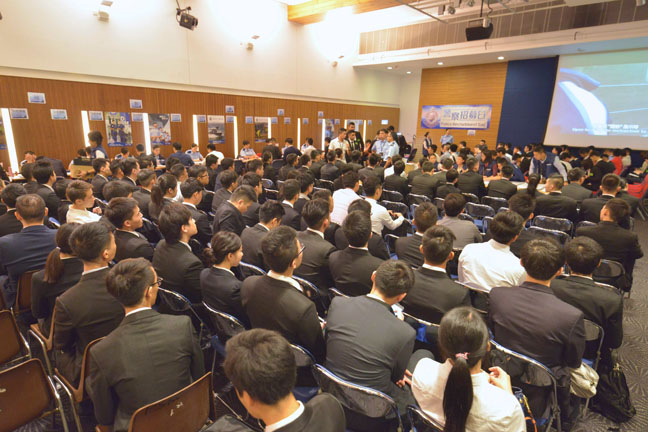
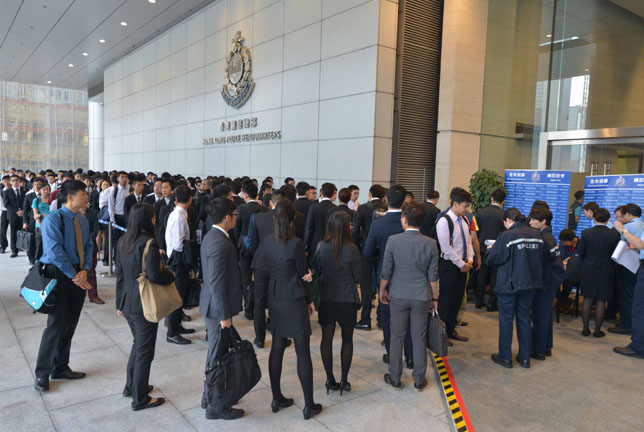
(Wen
Wei Po) November 11, 2015.
The Hong Kong Police received
more than 2,200 applications. The Hong Kong Police has a fiscal-year target of
recruiting 190 inspectors and 1,320 police officers. Compared to the summer
recruit day in July, this is a 5% increase. 768 applications were for the
inspection position, breaking a record for a single recruitment day. Each
inspection position has about 30 applicants while each police officer position
has about 10 applicants.
(Oriental
Daily) January 31, 2016.
Today the Hong Kong Police held
its winter recruitment day at the Wanchai Police Headquarters. There were 2300
applicants, which was 34% more than the December 2014 winter recruitment day.
There were 30 applicants for each intern inspector position and 10 applicants
for each police officer position.
(Oriental
Daily) January 31, 2016.
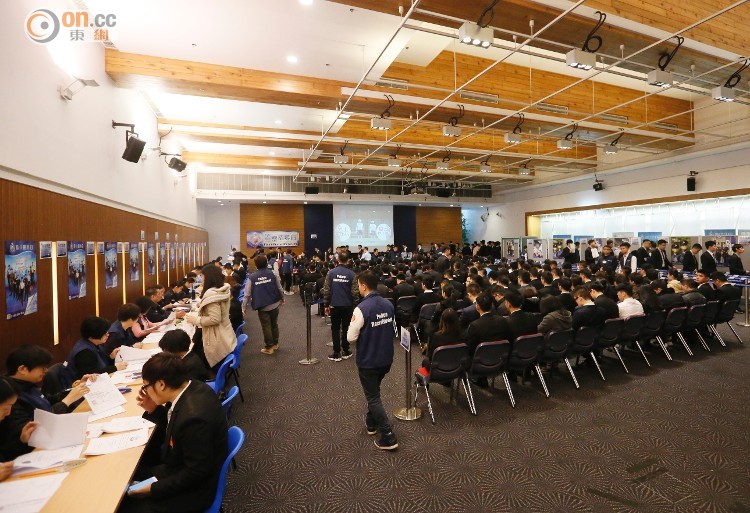
Whereas the average starting salary for a
university graduate is HKD 11,000, the starting salary for a police officer
is HK$21,410. For a police inspector, the starting salary is HK$37,885
without a university degree and $39,050 with a university degree.
Internet comments:
- Ever since the Umbrella
Revolution, everybody knows about the true nature of the Evil Police. Today no
young person with a conscience would ever consider joining the Evil Police.
That is a fact.
- I see. So the Hong Kong Police has only a bunch of old farts left ...
- Yo brother, if someone steals your wallet, you better not call the Evil/Black
Police for assistance.
-
If a university student does not want to be a government worker, what are
his options? Large corporations won't hire recent university graduates after
Occupy Central. So the options are pretty much limited to Apple Daily/Next
Magazine reporter, NGO volunteer or Legislative Councilor (like Joshua Wong
wants to be). However, there are only 35 directly elected Legislative
Councilor positions for 20,000 university graduates. The odds are a lot worse
than being hired as a probationary police inspector.
- Your mouth says NO but your body says YES by
walking into the Hong Kong Police recruitment centre.
- The numbers in this press release may be
confusing. There were 768 applications for the inspector position, for which
there are 190 openings. But there are supposed to be 30 applicants per
inspector position, not 768 / 190 = 4 applicants. The reason is that the
Hong Kong Police recruits year-round. Cumulatively across the recruitment
efforts so far this year, they have 30 applicants per inspector position.

(Metro,
News.china.com) March 23, 2015.
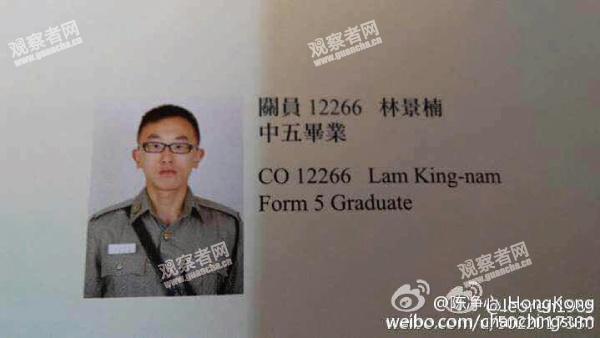
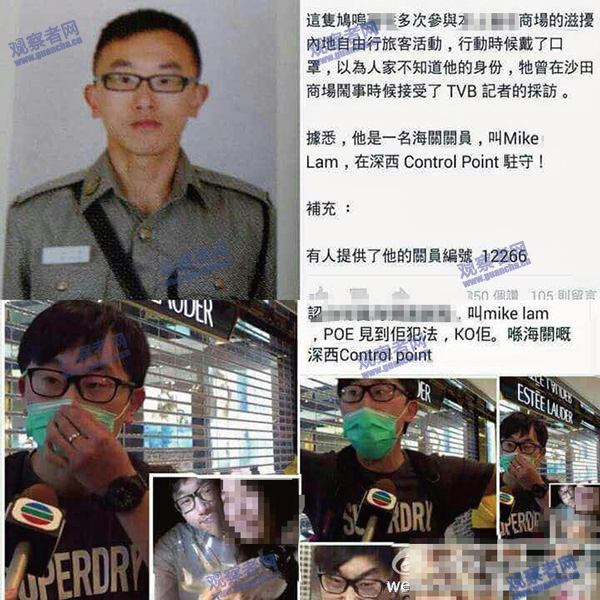
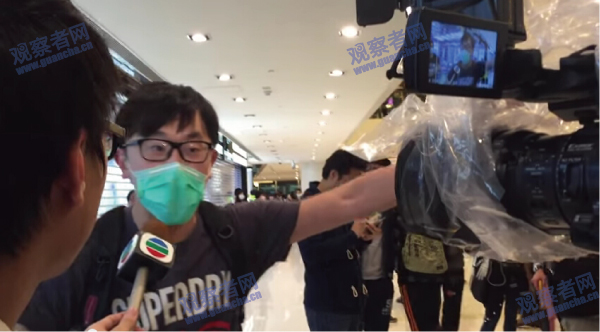
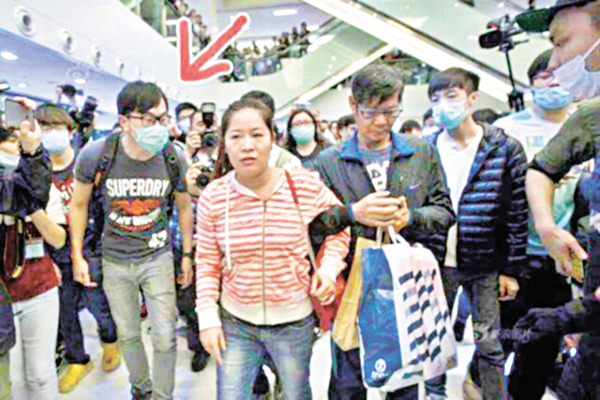
Recently Internet users alleges that a certain
Hong Kong Customs Officer named Mike Lam King-nam participated in the
anti-parallel trade demonstrations. Internet users uploaded photos of Lam
harassing mainland tourists and accused him of breaking the law while being
aware of the law. There was also an interview by TVB in which Lam spoke from
behind a
surgical mask (https://www.youtube.com/watch?v=ojwwg9o0BTE)
and then other masked men began to tell the TVB crew to get lost (note: no
condemnation by the Journalists Association ensued)! A Customs and Excise
Department spokesperson said that they will not
comment on individual cases, but they will follow their procedures in the event
that their employees violate regulations.
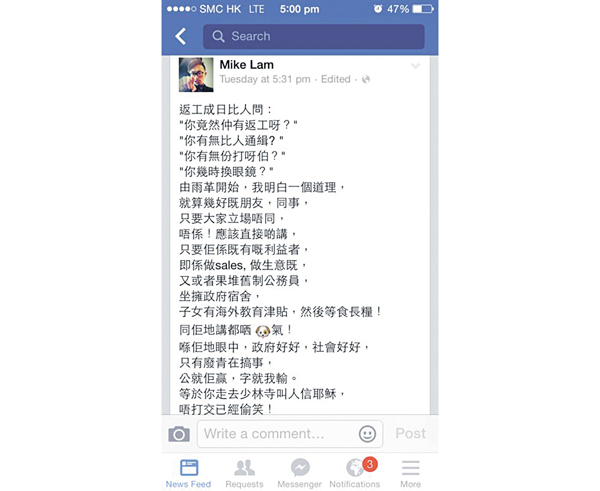
Mike Lam responded on Facebook:
When I go to work, I keep being
asked:
"Why are you still coming to work?"
"Is there an arrest warrant for you?"
"Did you take part in assaulting the grandpa?"
"When are you going to change your glasses?"
Ever since the Umbrella Revolution began, I realize one piece of truth
It does not matter how good friends and colleagues you are with,
As long as we have different positions ...
No! I just put it more directly,
As long as they are benefiting,
That is, they are salespersons, they are business people,
Or they are public servants under the old system,
They have government housing
Their children have overseas education subsidies, and they are waiting for the
pension!
It is a fucking waste of time to talk to them!
In their eyes, the government is doing fine, society is doing fine,
It's only the young wastrels who are causing trouble.
Heads they win, tails you lose.
This is like you going to the Shaolin Temple and telling them to believe in
Jesus Christ.
You would be lucky if you don't get into a fight!
Here are some more later
responses from Mike Lam:
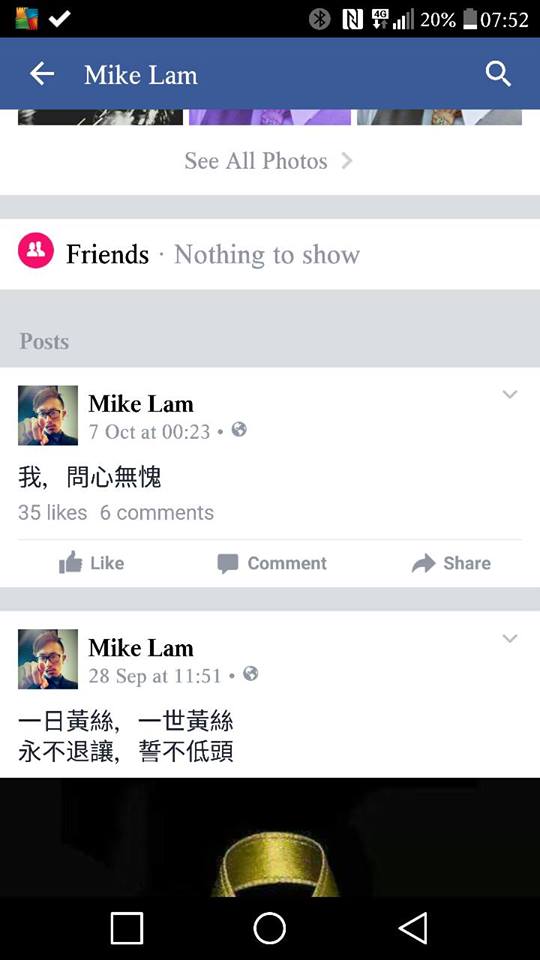
October 7: I am nothing to be ashamed of
September 28: Once a Yellow Ribbon, forever a Yellow Ribbon. I will never
retreat, I swear that I will never bow my head.
For all the tough talk, this
is what happened in the end:
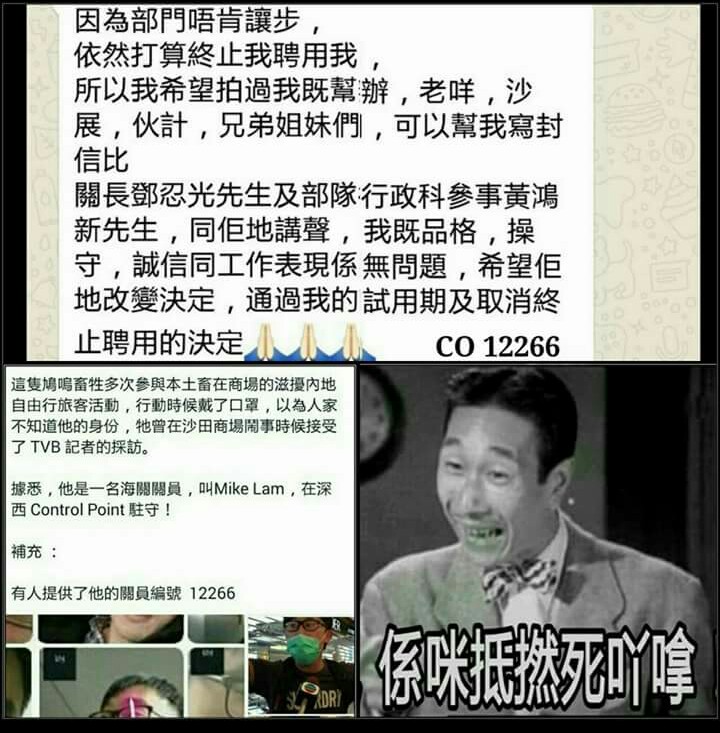
(translation)
Because the department refuses to relent
They are still determined to terminate my employment
Therefore I hope that all the inspectors, senior officers, sergeants and
officers, all my brothers and sisters, can write letters on my behalf to
the Customs and Excise Department commissioner Roy Tang Yun-kwong and Mr.
Wong Hung-sun of the Division's Administrative Department to tell them
that my character, conduct, trustworthiness and job performance are all impeccable. I hope that they will change their minds and decide to
accept my probationary term, and rescind the decision to terminate my
employment.
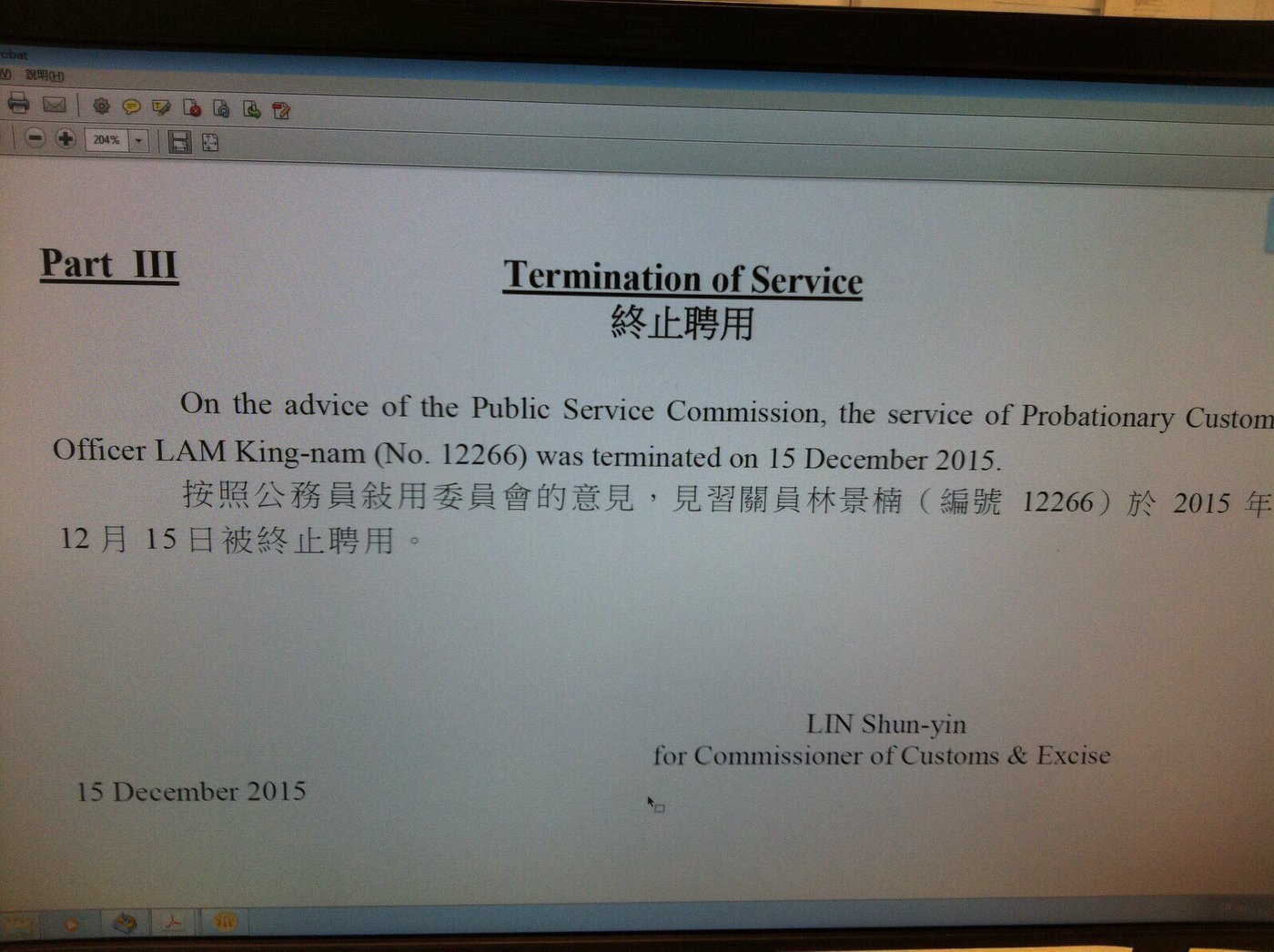
(Hong
Kong Free Press) December 16, 2015.
A probationary Customs and Excise
Department officer who posted statements critical of the DepartmentÆs
internal practices on social media was terminated from employment on
Tuesday.
The officer, surnamed Lam, joined an
ôanti-smugglingö protest in Shatin in February. In March, he was
identified by netizens opposed to the protest, some of whom said they
would file official complaints against him.
In the same month, Lam posted on Facebook
that ôat the department I am working in, there is an unwritten ruleö that
disabled, young and elderly people, mothers carrying babies and pregnant
women ôwill not be bothered.ö
He questioned whether the rule could be
abused by parallel traders using such identities as cover. According to
Apple Daily, Lam had once found a large amount of illicit cigarettes
concealed under a baby trolley but his colleagues told him ônot to create
a fuss.ö
Lam was asked to write a report about his
participation in the protests and was transferred from his border control
post at Shenzhen Bay Port to Man Kam To border control.
Lam also said that later in March, he was
questioned by disciplinary forces. The Customs Department asked him about
everything he had published on social media, including one post on his
participation in last yearÆs pro-democracy Occupy protests and another in
which he urged his friends to take part in the anti-smuggling protests.
In a letter from Customs in October, Lam
was informed that he was suspended. The letter noted that his social media
post may ôreflect a problem in your character and discretion.ö It also
stated that his ôintegrity is being questioned.ö
LamÆs employment was subsequently terminated
on Tuesday, December 15. Since he was still on probation, no reason was
given for his termination. Lam is currently considering lodging a judicial
review.
(The
Stand) December 15, 2015. Mike Lam wrote in Facebook today: "I can
put the work down, but I can never put public justice down! Since
antiquity, changes come through revolution, and revolution comes through
resistance! The people of Hong Kong must defend the last line. Internet
speech must not be controlled! This is Hong Kong, not China!"
- Change, revolution, resistance, freedom of
speech on the Internet, Hong Kong, China. Just a bunch of words tossed in
there with no rhyme or reason.
- Mike Lam said wrote on Facebook previously
that he intercepted a baby carriage and found a large amount of contraband
cigarettes hidden underneath the seat. But his colleagues told him not to
incur greater workload by going after "the old, the sick, the physically
handicapped, the small children, the pregnant women, or whole families"
because "they get paid one way or the other."
Meanwhile the Hong Kong Customs Workers
Union chairman Chan Ming said that this was the first case that a customs
officer has been dismissed for speech on the Internet.
Well, this is all one-sided rubbish. The
only trusted statement is "On the advice of the Public Service Commission,
the service of Probationary Custom Officer LAM King-nam was terminated on
15 December 2015." You have no idea what the Public Service Commission
knows or considers. The Customs and Excise Department has only said that they will not
comment on individual cases due to the Privacy Law.
- At any Customs service, they must surely
have a profiling system. Here is an example of the economics of resource
allocation. About 10,000
persons pass through here every hour. There are 20 of us. We can't stop
every traveler and search them. Therefore we must be selective. We can do
random checks, and our success rate is 0.01%. We can use a profiling
system so that our success rate is 0.5%. Who fits the profile of a
smuggler? It is not an 80-year-old inching along
with a walking cane, and not a pregnant woman dragging two small children
along, and not a person with a foot in cast and being pushed along in a
wheelchair, and not a family of seven with ages running from 3 years old
to 89 years old. Some of these people may be smugglers, but the
probability is much lower. You cannot say that just because you found one
of them among these people that you will hereafter concentrate on them.
This is not science. This is nonsense. Whoever insists on so doing does
not understand things. A customs inspector does not have to understand
this; all he has to do is to follow the policy which is set by people who
understand things.
- It is already a rule violation for a
Customs Department employee to openly discuss the profiling system. For
example, the Transportation Security Administration (USA) certainly does
not explain its
Airport Racial Profiling system because the effectiveness
depends on its secrecy.
(Ming
Pao) December 17, 2015.
Mike Lam does not think that he is a
radical and and he says that he has never participated in any demonstration march. On
September 28 when Occupy Central started, he and some colleagues went to
Admiralty to "fulfill their duties as Hongkongers." Afterwards, they
frequently went down to "provide protection" in Mong Kok and they wanted
to "mediate whenever people wanted to fight."
After the Occupy Movement was over, Mike Lam
unexpectedly got involved in Reclaim Sha Tin. He said that he was passing by
New Town Plaza after work to take a bus home. He saw the demonstration and
he decided to offer his support. He emphasized that on that day, he was
interviewed by the media and he only said that there were problems with
the policies without expressing any political inclinations.
Afterwards, the Customs department
management
asked to meet with him on March 21 and April 9 to ask him about the media
interview as well as his Facebook posts. In October 2015, he was
suspended. He has now been terminated.
(Oriental
Daily) March 15, 2016.
Ex-probationary inspector Mike Lam has filed
an appeal to the High Court for a judicial review in order to overturn his
dismissal by the Customs and Excise Department. He said that the the
Department consulted the Public Service Commission for advice on his case.
However, the Department did not disclose the information to Lam. Therefore
the process was unfair to Lam, who said that the Department has still not told
him why he was dismissed.
Internet comments:
- Doraemon: "There is nothing
more pleasing than to see someone fall in the street (pok gai)."
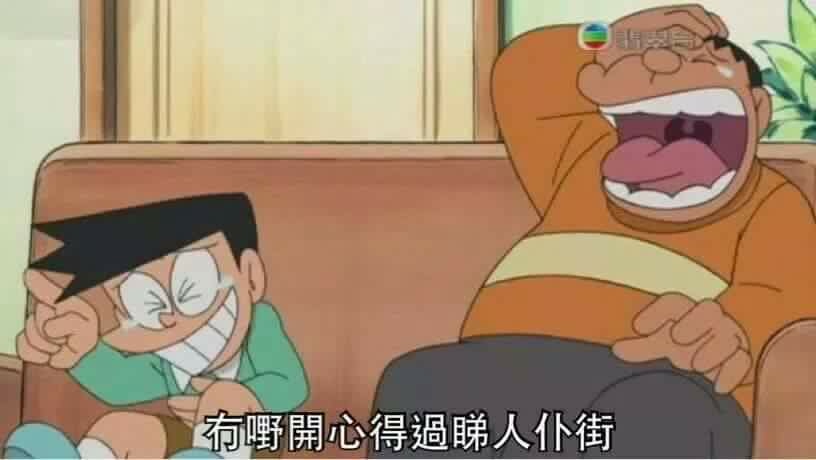
- He wants people to testify
that his character, conduct, trustworthiness and job performance are
impeccable? Hahahaha LOL.
- To quote Mike Lam himself, "It is a
fucking waste of time to talk to them!" Therefore I won't be writing any
fucking letters on his behalf.
- I think that I will write to Commissioner Roy Tang and thank him and the
Customs Department for making a good decision.
- Dear Mr. Lam, you should
have known that this was going to happen. Your only option now is to become
a valiant warrior, overthrow the Chinese Communist regime and their stooges
and then you will become the Customs Commissioner in the new Hong Kong
City-State.
- What a dickhead! If you want
to oppose the government, then why do you crave to keep your government job?
- Someone says that this
latest post is fake. Mike Lam resigned on his own to show his righteousness.
- LOL! Mike Lam said that he
yelled at this female mainland tourist on his way home without prior intent.
And then he also gave a media interview.
-

- Mike Lam wounded up helping
out in Reclaim Sha Tin because he was passing by on his way home and saw the
demonstration. This story is as good as foul-mouthed teacher Alpais Lam (#238)
passing by the Falun Gong table in Mong Kok on her to food shopping for her
Tseung Kwan O family.
- Mike Lam and some colleagues
went to Occupy Central to "fulfill the duties of Hongkongers." How many
times did the Police make public announcements about the unlawful
gatherings? Is he deaf and blind? P.S. Even he knew well enough to wear a
surgical mask in Sha Tin.
- Mike Lam traveled all over
the region to fulfill his duties as a Hongkonger, including Occupy Central
in Admiralty (Hong Kong Island), Shopping Revolution in Mong Kok (Kowloon)
and Reclaim in Sha Tin (New Territories). Each of these activities has a
loud and clear political position. Nevertheless Mike Lam still insists that
he is politically neutral?
- Is this brick-throwing
rioter (February 9th 2016 in Mong Kok) Mike Lam?
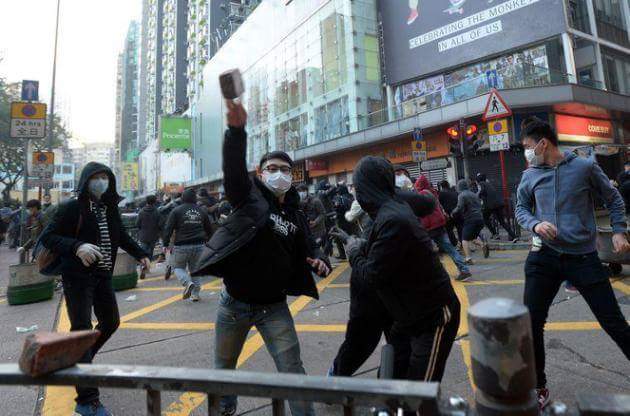
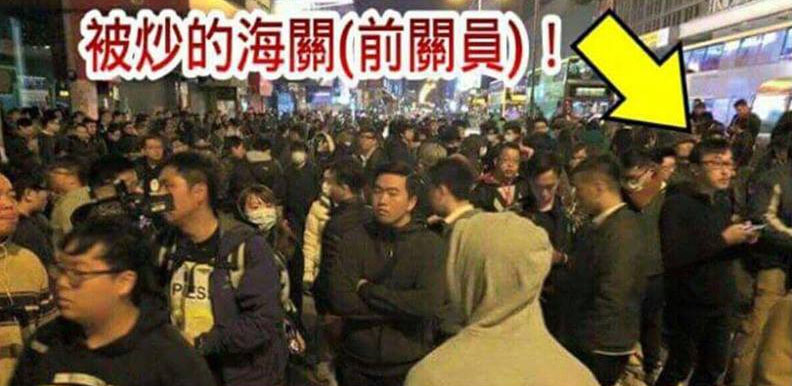

Here is the situation before the
November 2015 District Council elections (source)
| District |
Area (hectares) |
Population |
Median HH Income |
Total # of councilors |
#
Pro-establishment |
#
Pan-democrats |
#
Independent |
| Central &
Western District |
1,252 |
250,000 |
$35,000 |
18 |
14 |
4 |
0 |
| Wan Chai |
976 |
160,000 |
$34,000 |
13 |
11 |
2 |
0 |
| Eastern District |
1,890 |
580,000 |
$27,800 |
43 |
37 |
5 |
1 |
| Southern
District |
3,895 |
280,000 |
$28,000 |
20 |
15 |
5 |
0 |
| Yau Tsim Wong |
655 |
300,000 |
$23,600 |
20 |
18 |
2 |
0 |
| Sham Shui Po |
1,047 |
380,000 |
$18,000 |
24 |
17 |
7 |
0 |
| Kowloon City |
997 |
380,000 |
$24,600 |
25 |
20 |
5 |
0 |
| Wong Tai Sin |
926 |
420,000 |
$20,000 |
29 |
20 |
9 |
0 |
| Kwun Tong |
1,130 |
640,000 |
$19,000 |
39 |
33 |
6 |
0 |
| Tsuen Wan |
6,000 |
300,000 |
$26,900 |
21 |
17 |
4 |
0 |
| Tuen Mun |
8,445 |
480,000 |
$21,000 |
34 |
25 |
9 |
0 |
| Yuen Long |
14,430 |
570,000 |
$22,000 |
42 |
38 |
4 |
0 |
| North District |
137 |
305,000 |
$22,300 |
24 |
23 |
1 |
0 |
| Tai Po |
14,800 |
300,000 |
$26,500 |
23 |
19 |
3 |
1 |
| Sai Kung |
12,680 |
440,000 |
$30,800 |
29 |
18 |
9 |
2 |
| Sha Tin |
6,940 |
630,000 |
$26,000 |
43 |
35 |
8 |
0 |
| Kwai Tsing |
2,230 |
520,000 |
$19,600 |
35 |
20 |
15 |
0 |
| Islands |
17,600 |
140,000 |
$25,000 |
21 |
19 |
2 |
0 |
| TOTAL |
|
|
|
503 |
399 |
100 |
4 |
(The Stand)
https://thestandnews.com/politics/%E5%8E%9F%E4%BE%86%E6%B3%9B%E6%B0%91%E5%8F%AF%E4%BB%A5%E5%A4%A7%E5%8B%9D%E5%8D%80%E8%AD%B0%E6%9C%83/
October 19, 2015. Here are the projected outcomes if the pan-democratic voters
turned out at the same rate as they did for the 2012 Legislative Council
elections.
| District |
Number of seats |
Number of actual pan-democrat seats |
Number of pan-democrats according to 2012 Legco votes |
Predicted outcome |
| Central &
Western District |
15 |
4 |
13 |
Pan-democratic majority |
| Wan Chai |
11 |
0 |
10 |
Pan-democratic majority |
| Eastern District |
37 |
5 |
30 |
Pan-democratic majority |
| Southern
District |
17 |
5 |
13 |
Pan-democratic majority |
| Yau Tsim Wong |
17 |
2 |
17 |
Completely pan-democratic |
| Sham Shui Po |
21 |
7 |
21 |
Completely pan-democratic |
| Kowloon City |
22 |
5 |
21 |
Pan-democratic majority |
| Wong Tai Sin |
25 |
5 |
21 |
Pan-democratic majority |
| Kwun Tong |
35 |
2 |
26 |
Pan-democratic majority |
| Tsuen Wan |
17 |
3 |
13 |
Pan-democratic majority |
| Tuen Mun |
29 |
9 |
23 |
Pan-democratic majority |
| Yuen Long |
31 |
4 |
15 |
Pro-establishment majority |
| North District |
17 |
1 |
13 |
Pan-democratic majority |
| Tai Po |
19 |
4 |
18 |
Pan-democratic majority |
| Sai Kung |
24 |
6 |
15 |
Pan-democratic majority |
| Sha Tin |
36 |
8 |
36 |
Completely pan-democratic |
| Kwai Tsing |
29 |
14 |
27 |
Pan-democratic majority |
| Islands |
10 |
2 |
6 |
Pan-democratic majority |
| TOTAL |
408 |
86 |
322 |
|
1. I want you to vote in the
District Council elections.
2. The pro-establishment camp is able to
monopolize the district councils not because of their so-called "snake
banquets, vegetarian dinners, moon cakes and rice dumplings." Rather it is
because the pan-democrats' supporters failed to come out to vote. Let us
compare the election results from the 2011 District Council elections with
the 2012 Legislative Council elections. For example, in the Central &
Western District of Hong Kong Island, the pan-democrats got 18,195 votes
while the pro-establishment camp got 23,766 votes in the 2011 District
Council elections. One year later in the Legislative Council elections, the
pan-democrats got 29,028 votes while the pro-establishment camp got 27,931
votes. So the pan-democrats got 10,833 fewer votes and the pro-establishment
camp got 4,165 few votes in District Council elections than Legislative
Council elections. Clearly, the problem isn't with the pro-establishment
camp getting more votes. Instead, pan-democrats vote in the Legislative
Council elections but do not show up to vote in the District Council
elections.
3. Right now,
the pan-democrats have only 4 seats in the Central & Western District. If
every pan-democrat voter who voted in the Legislative Council for the
pan-democrats also voted in the District Council the same way, they should
have 13 seats instead and thus completely monopolizing the Central & Western
District Council. Over all 18 districts, the pan-democrats could have been
in the majority in 17 out of 18 districts, with three of them being
completely sweeps. So let me repeat once more: This did not happen not
because of "snake banquets, vegetarian dinners, moon cakes and rice
dumplings" but because the pan-democratic voters did not turn out to vote.
4. You may very well ask: If a candidate
claims to be a pan-democrat, then I must vote for him automatically?
Shouldn't District Council seats be given to those who perform service in
the community? The lead-in-water affair is the best lesson: At the key
moment, do you have the courage to say no to the government? It does not
matter how much service you have performed during normal times. Sorry, if
they are going to sell you out at the key moment, then they are sinners. On
the contrary, all pan-democratic candidates will never stand with the
government in such moment. One glass of water-with-lead showed what true
community work is. When you vote, this is what you are looking for. It does
not matter how well he treats you in normal times. It is more important to
know what he will do for you when you really need him.
5. Or you may very well ask: There are so many
pan-democratic parties and the one that I like is not running in my district
while I don't like the pan-democratic party that is running in my district.
I agree. If we can, we should all vote for our ideal candidate. But we
cannot afford to act impulsively. If you don't cast your vote, the
pro-establishment candidate will win. Then we are back to the
'lead-in-water' situation: If you don't want to have lead in your water, you
must vote the opponent of the pro-establishment candidate. You need to
punish the pro-establishment candidate. Afterwards, you still have many ways
of expressing your viewpoints on various pan-democratic parties. For
example, you can donate money to your favorite pan-democratic party. But you
should not think that you can punish a disliked pan-democratic party by
refusing to vote. When you turn on your tap, you will find that you are
punishing yourself.
6.
Or you may very well ask: Isn't the District Council just a Tai-chi class.
Why bother to vote? Let the pro-establishment camp win if they want to. No.
Have you heard of the $100 million budget allocation per district? In Tai
Po, the District Council allocated the money to the Tiananmen Gate in Lam
Tsuen. This is your blood-and-sweat taxpayers' money. Also, the
pro-establishment camp uses the District Council to help their Legislative
Council election campaigns. In 2003, the pan-democrats held the majority in
the Wan Chai District Council and introduced many groundbreaking measures.
Many pan-democrats have ideas and experiences on letting the people take
charge. They are worth investigating. You would be out of touch if you think
that the District Council elections don't concern you.
7. We have been fighting for genuine universal
suffrage all along. The District Council elections are the closest things to
genuine universal suffrage in Hong Kong. We have fought for it so hard. Now
that we have the vote in hand, we should obviously cast our vote.
8. I invite everybody to vote in the District
Council elections. Not just yourselves but you should encourage your
families, friends, fellow students and colleagues to vote. It is one thing
to lose, but it would be a pity if that's because we didn't show up to vote.
Internet comments:
- So we vote for a pan-democrat
and then we wait for the next lead-in-water crisis so that he/she can serve
our community. In the meantime, we must wait. And wait we must.
- No. I don't care about lead-in-water. In the long run, we are all dead from
either lead-in-water or sunspots or comets or pesticides or growth hormones or antibiotics or
global warming or alien invasion or lightning bolts from the sky or whatever. In the short run, I want my snake banquets,
vegetarian dinners, moon cakes and rice dumplings. So how much can you offer
me?
- Everyone with a pair
of eyes can see that the pro-establishment camp isn't winning because of
their "snake banquets, vegetarian dinners, moon cakes and rice dumplings."
The pan-democrats are every bit as good with "snake banquets, vegetarian
dinners, moon cakes and rice dumplings" (see
#346). So it has to be something
else.
- For a case
study, you can refer to the
Kwun Lung constituency in Central & Western District.
In 1994, Ip Kwok-him (DAB) defeated Nicky Wong (Democratic Party) by 51.9%
to 47.7%.
In 1999, Ip Kwok-him (DAB) defeated Rosa Mok (Democratic Party) by 57.6% to
42.4%.
In 2003, Ip Kwok-him (DAB) lost to Cyd Ho (Civic Act-up) by 49.1% to 50.9%.
in 2007, Ip Kwok-him (DAB) defeated Ho Loy and Jacky Leong by 85.0% to
15.0%.
In 2011, Ip Kwok-him (DAB) defeated Leung Kwok-hung (League of Social
Democrats) by 73.7% to 26.3%.
In 2015, Yeung Hoi-wing (DAB) runs against Sixtus Leung (Youngspiration).
The story is this: Kwun Lung constituency was
a DAB stronghold. In 2003, riding behind the massive turnout at the July 1st
march, Cyd Ho upset Ip Kwok-him by a margin of just 64 votes. But after
becoming District Councilor, Ho was invisible to the constituents because
she did not find the job to her liking. The idea of winning an election by
defeating a well-known pro-establishment incumbent was
infinitely more appealing than the reality of serving the community. Cyd Ho
did not run for re-election, and Ip Kwok-him stormed back with a 85%
plurality to crush Ho's successors.
So all candidates should know what the job
entails and whether they are willing to commit to doing the job. Otherwise,
you are wasting everybody's time, including your own.
So who do you think the Kwun Lung's voters
will go for? Ip Kwok-him's successor? Or a parachuter?
- Amazing! A lengthy so-called political
analysis that is based solely on 2012 Legislative Council and 2011 District
Council elections projected to 2015. Not a single word of mention about
Occupy Central, Umbrella Movement/Revolution, Umbrella Soldiers, Localism/Nativism,
9wu (Shopping Revolution), Reclaim XXX or Leftist Retardism.
- According to the analysis above, the
pro-establishment camp will get only 86 seats. So far, they have already won
66 out of 68 uncontested seats. This means that they will lose by 320 to (86
- 66) = 20 in the upcoming contested elections. Let's wait and see.
- It gets worse. Of the contested districts, 21 are among pro-establishment
candidates only. No matter who wins, the councilor will be a pro-establishment person.
Therefore the analysis is already broken. This means that the pan-democrats
will have to win by 319 to 0. Let's wait and see.
- Amazing! The article above has more than 300,000 reads so far as many
Yellow Ribbons liked/shared the optimistic message of a resounding victory ahead.
- (Sing
Tao October 28, 2015) The Democratic Party fielded 28% fewer
candidates than before because their candidates are often assistants to
district directors and the party has a hard time retaining them with the
lousy pay. Civic Party is fielding almost 40% fewer candidates because they
demand their local executives to maintain field presence and their resources
only allow them to support so many people. People Power and the League of
Social Democrats are fielding 80% fewer candidates.
Why are the large pan-democratic parties
fielding fewer candidates? Because they realize that candidates can win only
by doing community work in preparation for years beforehand. Parachuting a celebrity
into a district will win some media mentions, but victory is unlikely.
Nobody is going to vote for you just because you say that you are a
pan-democrat or that you support genuine universal suffrage. They want to know whether you will be there for them if there is
a water leak on their ceiling.
-
Video:
https://www.youtube.com/watch?v=b-SHoOHAQ3Y October 4, 2015.
1:14 (Reporter) He said that he wouldn't
serve as District Councilor even if he got enough votes (to win).
1:18 (Nakade Hitsujiko) Forgive me, I am
unbridled and I want to be free. Please pardon me for not assuming that
post. I am not interested in spending four years of my life to add
railings (in the street) for you, or add handrails. What I can give you is
far more than any of these local tasks. I can say that.
How can you vote for somebody like this?
He wasn't around before, he shows up during the election period for media
interviews and he assures us that he will become invisible if elected. And this
is the lone candidate fielded by the Hong Kong City-State Royal Family.
(Hong
Kong Free Press) October 27, 2015.
The Council of the University of Hong Kong
(HKU) has voted to suspend Student Union president Billy Fung Jing-en from
future confidential meetings after he leaked details from earlier talks.
In September, Fung breached the CouncilÆs
confidentiality rules by publicly revealing the reasoning behind the bodyÆs
controversial decision to reject Johannes Chan Man-munÆs candidature for the
UniversityÆs pro-vice-chancellorship.
Although Fung will retain his seat on the
Council, his ôrefusal to abide by the principle of confidentialityö means
that he will be barred from participating in confidential discussions with
other Council members, who have said that the confidentiality clause is
essential for free discussion.
During the fallout surrounding the Johannes
Chan controversy, Fung defended his actions by arguing that the open and
transparent operation of the Council is more valuable than the
confidentiality clause. He also said that his revelation was not for
personal gain but was in-keeping with the right of the students to know the
CouncilÆs reasoning.
HKU
Academic Staff Association chairman Dr William Cheung Sing-wai
earlier said that he was proud of Fung for speaking up for righteousness
and that the association could not rule out actions supporting Fung if
disciplinary action was taken against him.
(Oriental
Daily with video) October 27, 2015.
University council
president Leung Che-hung held a press conference to explain what was taking
place at the meeting. At 0:52 in the video, Hong Kong University Students'
Union president Billy Fung Jing-en charges over to seize the microphone. He
went on a monologue with a loaded question. At 1:15, Leung replies that Fung
should say that at the meeting itself.
(The Stand) October
28, 2015.
https://www.thestandnews.com/politics/%E6%9C%89%E5%BE%97%E8%81%BD-%E6%B8%AF%E5%A4%A7%E6%A0%A1%E5%A7%94%E6%9C%83%E6%9C%83%E8%AD%B0%E9%8C%84%E9%9F%B3%E6%B5%81%E5%87%BA-%E8%AD%89%E5%AF%A6%E6%9D%8E%E5%9C%8B%E7%AB%A0nice-guy%E8%AB%96-%E5%98%B2%E9%99%B3%E6%96%87%E6%95%8F%E6%98%AF-%E9%BB%A8%E5%A7%94%E6%9B%B8%E8%A8%98/
Commercial Radio played
certain audio recordings (https://www.youtube.com/watch?time_continue=32&v=NwH_w8jp-lg)of
the September 29 meeting of the Council of the Hong Kong University. Here is
Arthur Li (Speakout
HK October 28, 2015).
Mr. Chairman,
When I came on the scene, I thought his
would be a very straightforward matter. The Vice-Chancellor makes a
recommendation, and we rubber-stamp it, and that's deemed a fact. However,
I do have some worries that I feel I should articulate. The Dean, the
Vice-Chancellor, in those days were elected by the Faculty. So all you
have to do is to be a nice guy to everyone, and I think Johannes Chan is a
very nice guy. And at this point, I'd like to declare my interest: there
was one of the referees which is my cousin. And my cousin has already said
he's very, very nice guy.
So from that point of view, I have no
worry in that he is dean, my main worry on academic side was that he has
no higher degree equal to a PhD or an MD or LLD. Now you may say in law is
not necessary. Well, if it is not necessary, why is such a degree there in
the first place? And when you look at the other referee professors, they
all got LLDs. Therefore, either he hasnÆt tried or he is too busy or he
doesnÆt think it is important, but if thatÆs the case he will be
devaluated maybe of the lecturers, professors who have got PhDs, who have
gone through the rigours of academic pursuits. Now, can you ... can
someone be in charge of promotion of another person who actually has not
gone through the same rigours as that other person and give an honest
independent objective view? And I would put my question here is that, I do
have my doubt about this.
The second thing IÆd like to bring up is
that, weÆve been said that weÆve been under a lot of pressure form the
liaison office, from the Chief Executive, and IÆd like to say very
categorically I have not been under any pressure. It has been said that
the left-wing press, 文匯報(Wen Wei Po)、大公報 (Ta Kung Pao) have been running
hundreds of articles against this candidate. And quite honestly, I donÆt
read 文匯報 or 大公報, and I think most people in Hong Kong do not read 文匯報 or
大公報. Relatively most people take a negative view, the more they say about
something, the more we feel anti whatever they say. However, on the other
side, itÆs that the political parties are very well organized, very well
informed, very wellàhow would I sayà very keen to push this candidate by,
as Leonie said, by intimidation, by failing our council meeting, by having
concern groups and all these threatening JRs and everything. But I just
wonder why are these political parties so keen on this candidate. Is it,
you know, in the Mainland university, they have 黨委書記 (Party Secretary). Do
they want a 黨委書記 at Hong Kong U? Is he a 黨委書記, is he put in here as a
黨委書記? So I donÆt know, forgetting about the politics, all these things
made me feel very uncomfortable and very uneasy with this candidate.
Thank you.
(The
Stand) October 28, 2015.
With respect to the "nice guy" talk,
Johannes Chan said that he was department head for three years since 2002
and his ability could be seen by all his colleagues, who voted for someone
who has the abilities. Someone who knows only to vote for nice guys may not
understand this. In 2005, the university became to hire globally so it was
ignorant of council members to refer to a defunct system.
With respect to no having a doctorate,
Johannes Chan said that the university should have a sound system for
hiring. Experience and fairness in handling are unrelated to having a
doctorate or not. Some of the discussions by the university council members
showed that doctorate has no obvious relationship to ability and character.
With respect to the Party Secretary talk,
Johannes Chan said that this was preposterous. With respect to his
appointment, he said he has never discussed the matter with any political
party. Therefore there is no basis for Li's assertion. Li's logic is that
anyone with a political party background will be a Party Secretary if they
become a senior government official.
(SCMP)
Pot meets kettle? Dirty tricks and interference at the University of Hong
Kong. By Alex Lo. October 29, 2015.
Some people who have accused the chief
executive of interfering in the internal affairs of the University of Hong
Kong are the ones who would go to extraordinary lengths to discredit people
who disagree with them. Among their dirty tricks are making unauthorised and
possibly illegal recordings and leaking them to the media.
Protests, biased surveys, name-calling, the
storming of official meetings and unlawful detention of persons are not
enough.
The latest shenanigan involves someone
inside the university council who leaked an audio clip to Commercial Radio.
The clip concerned has council member and former education minister Arthur
Li Kwok-cheung commenting on Johannes Chan Man-mun, the legal scholar at the
centre of an appointment row, during a crucial council meeting.
Unfortunately for Li's opponents, there was
no smoking gun or incriminating remarks.
All Li said was that Chan was a "nice guy"
but unqualified for the senior managerial position and that the former law
dean lacked a PhD. A little later in the clip, he dismissed claims that the
council had been under political pressure from the central government's
liaison office or Chief Executive Leung Chun-ying, and suggested some
political parties were "very keen to push" Chan as a candidate.
Well, we know all this already. Almost
immediately after that meeting, Billy Fung Jing-en, a council member and
president of the HKU student union, breached confidentiality rules and
spilled the beans on the discussions. The timing of the leak, though, is
more interesting. The fear on the HKU campus is that Li is about to become
council chairman.
I agree that Li would be the worst person
for the post at this time. I don't question his qualifications and
intellect. But putting one of the city's most politically divisive figures
in that post will ensure open warfare on campus when the university
desperately needs to return to normality so students and scholars may get
back to work. Mind you, nothing will stop some students from making more
noise.
To make their case, some have demonised and
physically abused Li, including the latest leak, while making accusations of
government interference without a shred of evidence. Just who is playing
dirty tricks and interfering here?
(Bastille
Post) October 30, 2015. Secret recording of the remarks of council
member Leonie Ki Man-fung.
Chairman, I have been a corporate CEO and
employer for over 30 years, and I have interviewed and hired hundreds of
people in the past. But never in my life have I encountered a candidate who
will overtly and recklessly discuss his or her potential employment at any
stage of the recruitment process. This in fact is already in breach of
confidentiality.
It is most unfortunate that the candidate
recommended by the University Search Committee has never been tabled at this
Council for deliberation, in our view we are actually doing it according to
procedures.
I am in support of press freedom and also
in sympathy with the candidate who defended himself against the criticism of
some media, but apparently he has gone too far, to create controversy and
use external and internal forces, directly or indirectly to lobby,
pre-claim, coerce, intimidate, fabricate and sometimes even threaten Council
members to approve his appointment. I myself was a victim on Febrary12 this
year, when I was accused by a local newspaper for stalling his appointment
at this Council. I then had to issue a public statement to clarify that the
Council has not even started to discuss this appointment. This is just one
incident among many, and to me, all these tactics in fact are interferences
with the University affairs at highest level.
As members of the Council, and also trustee
of the University, we are professionals with our independent judgment and
ethics, we do our assessment based on the (àà )community at large. Given
that position of the pro-vice-chancellor is responsible for academic
recruitment and resources, the pro-vice-chancellor should be a role model
for all, staff and students included. So I have strong reservation about the
recommended candidateÆs integrity and I would not accept the recommendation.
Thank you.
Audio:
https://www.youtube.com/watch?time_continue=3&v=B-d5tWxyRc4
(SCMP)
Why is there no public outrage over the HKU audio leak? By Lawrence J.
Lau. November 1, 2015.
I was shocked to learn that the supposedly
confidential proceedings of a meeting of the University of Hong Kong council
were secretly recorded, presumably by one of its members, and leaked to a
local radio station, which broadcast what two of its members, Professor Arthur
Li Kwok-cheung and Leonie Ki Man-fung, said at the meeting word for word. It
is not known whether what other members said will make the air eventually. The
secret recording, without obtaining the prior consent of those being recorded,
and its subsequent release, also done in secret, was an utterly despicable,
irresponsible, selfish and cowardly act.
In the US, recording conversations in secret
is a criminal act in some states. Such laws are intended to protect the rights
and privacy of individual citizens. Anyone who purports to support human
rights and the rule of law must support such protection.
However, what is even more shocking is that
hardly anyone in Hong Kong academia and no one in media circles seems to
think there is anything wrong here. While it may not be illegal in Hong Kong
to record conversations in secret, or to broadcast such recordings, it is
certainly unethical. A distinguished institution of high learning such as
HKU, which is supposed to educate our youth, should have a higher standard
than simply "no law was broken".
HKU's guidelines and code of practice for
council members clearly states that, "While students and staff and the
public should have access to information about the proceedings and decisions
of the council à it is necessary to keep confidential the council agenda,
supporting papers and minutes, especially when they are concerned with
individuals or plans yet to be finalised or have a commercial sensitivity.
Indeed, discussions at the council meetings and council papers are
confidential and all members of the council should uphold this principle of
confidentiality, to allow free discussions and exchange of views at council
meetings."
But on a more fundamental level, secret
recordings destroy mutual trust. It will certainly have a chilling effect on
free and open communication and exchange at the university if members begin to
suspect that whatever they say may be secretly recorded and broadcast at some
point. And if there is no mutual trust even at the university, would there be
mutual trust elsewhere? Without mutual trust, which takes years to build and
just seconds to destroy, our society cannot function properly. Moreover, our
condoning of such egregious behaviour, or our turning of a blind eye,
contributes to further erosion of our core values of justice, fair play, and
mutual respect despite disagreement. The perpetrators of these despicable acts
cannot be compared to Daniel Ellsberg and Edward Snowden, who did break the
law, but did so openly and accepted the full legal consequences of their
actions.
he current episode reminds me of a similar
incident in Hong Kong in 2006, also involving Li. At that time, the head of
a tertiary educational institution secretly recorded a phone conversation
that he had with Li, who was then secretary for education, and then
attempted to use it against Li, apparently intending to entrap him. Shocking
as such behaviour might seem, especially for the head of an institution of
higher learning, what was even more shocking was that no one at the time
thought there was anything wrong with what he did. Certainly no one from
academia or from the media spoke up against it. And there was neither shame
nor remorse.
Some of us who preach the "rule of law"
every day do not feel restrained to violate either the letter or the spirit
of the law, or ethical standards, whenever it suits their purpose. To them,
the "rule of law" is just a slogan to be used and not a principle to be
followed. They pay only lip service to fair play, justice and mutual
respect. It is really sad that our standards have sunk so low in Hong Kong
in recent years, that any means, no matter how dishonest, unethical (or even
illegal) can be justifiably used to pursue an end.
It is time to ask: have we no sense of
decency left in Hong Kong?
[Lawrence J. Lau is the Ralph and Claire
Landau Professor of Economics at the Chinese University of Hong Kong, and
Kwoh-Ting Li Professor in Economic Development, Emeritus at Stanford
University.]
(The
Standard) Whistleblowers? No, they're snitches. November 3,
2015.
One of the world's
most famous whistleblowers was a senior FBI official nicknamed Deep Throat.
He leaked confidential information to two Washington Post reporters to
expose the illegal things President Richard Nixon did in what came to be
known as the Watergate scandal. Deep Throat's real name was revealed in
2005. Another famous whistleblower is Edward Snowden, who worked for the US
National Security Agency. He leaked secret information about world-wide
illegal electronic spying and monitoring of e-mails by the US. Many people
say whistleblowers are heroes, but what exactly is a whistleblower? The
Oxford Dictionary defines a whistleblower as a person who reveals
information about illegal or immoral activity. The Cambridge Dictionary
defines it as a person who provides information about illegal activity,
especially by the government or a company.
Many people have praised Hong Kong
University Students' Union president Billy Fung Jing-en as a whistleblower and
a hero who dared to leak details of a confidential meeting of the Hong Kong
University Council to discuss the appointment of Johannes Chan Man-mun as
pro-vice-chancellor. But is it accurate to describe him as a whistleblower?
It is not accurate if you look at the exact meaning of a whistleblower in
the Oxford and Cambridge dictionaries. As a HKU Council member, he revealed
the names of council members who voted against Chan Man-mun as
pro-vice-chancellor, and he revealed what they said even though the meeting
was confidential.
Voting against Chan Man-mun and saying he
is not qualified as pro-vice-chancellor are not illegal or immoral
activities. The HKU Council allows members to vote how they want and to
express opinions. Fung Jing-en is, therefore, not a real whistleblower
according to the dictionary because he only leaked information about the
opinions and votes of others that he disagreed with for political reasons.
The unidentified person who leaked an audio of what council member Arthur Li
Kwok-cheung said during the meeting is also not a true whistleblower because
Li Kwok-cheung did not say anything illegal when he voted against Chan Man-mun.
It is more accurate to call a person who leaks information for political
reasons a snitch (informer, traitor).
(Hong
Kong Free Press) November 8, 2015.
A recording of a speech made by another
Council member of the University of Hong Kong has been leaked on a popular
Taiwanese internet forum. It follows the publication of two other leaked
tapes from the controversial meeting and a court injunction granted to HKU
to restrict their distribution.
The transcript and recording of Rosanna
Wong Yik-ming was uploaded to PTT, one of the most popular forums in
Taiwan, at around 8pm on Sunday. The speeches were apparently made during
the same September 29 meeting as the previously leaked tapes. During the
meeting, liberal law scholar Johannes Chan Man-munÆs appointment to the
pro-vice-chancellorship of the university was rejected.
Rosanna Wong was once rumoured to be the
next HKU Council chairperson, but no appointment has yet been made. The
term of former chairperson Edward Leong Che-hung ended on Friday, November
6.
In the recording, Wong spoke against the
appointment of Johannes Chan because, she says, he would further divide
HKU. Her comments are in-keeping with what HKU Student Union president
Billy Fung Jing-en previously revealed about the meeting. Wong said that
she knew Chan well, but she his appointment was not in the ôinterest of
the Universityö.
She said that HKU had ôbeen undergoing
quite a bumpy journey,ö lately with incidents such as the controversial
visit to HKU by Chinese Premier Li Keqiang in 2011, the pro-democracy
Occupy protests last year, the Occupy donation incident concerning law
professor Benny Tai Yiu-ting and recent events surrounding Chan. ôIt
really, I think to me, is becoming a distraction of the University and it
prevents the University actually to look longer term.ö
ôIf we ever even think of any
opportunities that we should grab and let this University shine and glow.
IÆve been patiently waiting, you know û the new VC coming to this
University, with a hope that we have a smooth strategy of development. No
time, no discussions û everything has been pre-occupied and dominated by
this side political issue, the issues that are so divided in the
community. And I am sick of it.ö Wong said.
She said that appointing Chan would
further divide HKU: ôBecause of the potential controversy of this
candidate, I donÆt say whetherà the candidate is wrong or why we can bring
this up, but there is a potential controversy, it exists whether you,
whatever position youà whether you are on yellow camp or the blue camp, I
donÆt care, but the potential controversy exists.ö
ôAnd because of a strong political
position of this candidateà I do not have enough confidence that this
candidate would probably help to unite, but on the contrary, he probably
would further divide,ö she added. ôNow this is a senior executive position
thatÆs on academic staffing and resourcesà I think in a lot of cases
during my career to appoint a lot of senior executives, persons can be
qualified but may not be suitable.ö
ôI know this candidate well, heÆs a good
gentleman, but sometimes for a lot of other reasons, he may not be totally
suitable,ö she said, ôAnd I have to say, because of the controversy that
exists, because of his strong political position, because of the potential
risk of further divide the community, I have to say I do not have enough
confidence to accept this recommendation.ö
ôAnd I want the candidate, at least, the
future PVC or the Vice President, must be able to unite and must not
politicise the working place that he is working in.ö
She concluded saying the Council should
search for another candidate.
(EJinsight)
November 9, 2015.
A
leaked recording from a controversial University of Hong Kong (HKU) council
meeting has surfaced in Taiwan, just days after a Hong Kong court barred the
broadcast of any material from the closed-door deliberations.
The eight-minute audio clip, which comes
with English and Chinese transcripts, were uploaded on PTT, one of the most
popular online forums in Taiwan, Apple Daily reports. In it, council member
Rosanna Wong, 63, is heard saying that former law dean Johannes Chan, then
the only pro vice chancellor-nominee, is ôunfit for the roleö because of his
ôstrong political stanceö.
Last week, Commercial Radio ran extensive
broadcasts of similar negative comments by fellow council members Arthur Li
and Leonie Ki in what appeared to be a concerted attempt by the council to
derail ChanÆs nomination by its own search committee.
HKU won a court injunction to stop further
broadcasts of the leaked recordings, although LiÆs comments later surfaced
on a sexually explicit Hong Kong website after Commercial Radio agreed to
abide by the court order. The porn site version reportedly is not
specifically covered by the injunction and the Taiwanese recording, uploaded
by a self-described ôSavior for cowardsö, is out of the Hong Kong courtÆs
jurisdiction.
Wong,
who is seen as a potential successor to council chairman Edward Leong who
stepped down on Friday, is heard saying in the Taiwanese recording that the
person for the post is ôexpected to unite HKUö but she has ôno faith in
Chanö. ôThat is why I do not
want to see anybody coming in and further dividing [HKU].ö
Wong is a deputy to ChinaÆs powerful
political advisory body. She became an executive councilor shortly after
resigning as Housing Authority chief amid a scandal over substandard
groundwork on a public housing construction site.
HKU
president and vice chancellor Peter Mathieson is heard in the recording
rebutting WongÆs comments that progress in the university has stalled.
Student union chairman Billy Fung, who is
also a council member, said WongÆs comments were made during a Sept. 29
meeting in which the council rejected Chan by a 12-8 vote. Shortly after
that meeting, Fung told a media briefing about the reasons for ChanÆs
rejection, notably his lack of a doctorate degree. The revelation sparked
controversy, with council members accusing Fung of lying and violating
confidentiality regulations.
Meanwhile, an unnamed source said the next
recording might feature Lo Chung-mau, head of the HKU surgery department.
(SCMP)
November 9, 2015.
HKU principal law lecturer Eric Cheung Tat-ming
suggested that media in Hong Kong could report on the latest leaked comments
because it was uploaded into the public domain and on a Taiwanese website,
which was understood to be outside Hong KongÆs jurisdiction.
A legal source, who spoke on condition of
anonymity, also agreed with CheungÆs argument about the limit of Hong KongÆs
jurisdiction. He said HKU would have to apply to Taiwanese courts to ban
publication. But he questioned whether the public domain clause applied if
the recording was uploaded on Hong Kong soil to the Taiwanese website.
(EJinsight)
Why is the media holding back on the latest HKU Council tape? By
Wong On Yin. November 10, 2015.
The controversy related to the Hong Kong
University (HKU) Council meeting that rejected Professor Johannes ChanÆs
appointment as the universityÆs pro-vice chancellor shows no signs of
abating.
After Commercial Radio aired leaked audio
recordings from the September 29 meeting late last month, revealing the
remarks made by council members Arthur Li and Leonie Ki as they opposed
ChanÆs appointment, another clip has surfaced over the weekend, this time
involving Rosanna Wong.
In the clip that was uploaded on a popular
Taiwan online forum at around 8 pm on Sunday, Wong could be heard speaking
about her own reservations about ChanÆs candidacy.
Intriguingly, however, the leaked recording
of WongÆs remarks has received little media coverage in Hong Kong so far. As
of Monday, only the Apple Daily ran a front page story on that. It really
boggles the mind as to why this audio clip, which is already circulating in
the public domain and completely free for everyone to use, would be
ôboycottedö collectively by the local media.
In my opinion, it is hardly coincidence
that the major TV networks and newspapers in our city have all turned a
blind eye to the latest clip. It appears that some force or ôintelligenceö
is pulling the strings from behind the scene in order to prevent the clip
from drawing public attention.
Now, I have to say that I really donÆt
appreciate this kind of ôintelligenceö. In fact, IÆd rather call it
ôstupidityö. Based on my observation, there are just too many stupid people
around in our media industry, who are only good at sensationalism and
swimming with the tide, and are often just too eager to be used as a
mouthpiece by government spin doctors.
Even an average individual like me can tell
that the leak of the recordings, which has taken place step-by-step in a
well-organized manner, must have been masterminded by someone.
However, no matter who is behind the leak
of the tapes, whether it is the CIA or the National Security Council on the
Mainland, and no matter what their motives are, as long as the recordings
are authentic, the media is duty-bound to make them public, because the
publicÆs right to know outweighs everything.
Also, the job of journalists and media
chiefs is to verify and release information, rather than censor it.
I believe our media workers shouldnÆt be
concerned about anything else other than the authenticity of the tapes, nor
should they be worried about who will benefit or who will be harmed as a
result of making the tapes public.
The only thing that matters when it comes
to journalism is to provide the public with every piece of true information,
and let them exercise their own judgment. Any attempt to screen or even hold
back material that reveals the truth, no matter what the reasons may be, is
a violation of the basic code of conduct of the media.
LetÆs not forget the reason why the Hong
Kong Journalists Association is contesting the court injunction that
prohibits the circulation of the information leaked from HKU Council
meetings. The reason is to defend the publicÆs right to know.
Now that the High Court has ruled that the
interim injunction doesnÆt apply to the clips already in the public domain
and any circulation of those audio clips outside Hong Kong, what the public
is looking forward to is definitely more secret recordings coming to light
so that they can piece together the facts about the discussion during that
HKU Council meeting and identify the people who denied Professor Chan his
appointment on ridiculous grounds.
ArenÆt our media supposed to tap into the
existing material and make public whatever secret tapes there are in order
to serve the publicÆs right to know regardless of court orders and the
political interference of Leung Chun-ying?
ArenÆt they supposed to fulfill their role
as the fourth estate and raise the red flag against any social injustice? If
our reporters fail to follow all the clues and facts wherever they lead on
this critical issue, it will not only constitute a breach of duty on their
part, but also a breach of public trust.
So why did the media deliberately turn a
blind eye to Rosanna WongÆs leaked tape? As I have pointed out before, our
media has been dominated by an ôevil democratic forceö, a phrase which I
coined eight years ago.
This ôevil forceö refers to a bunch of
powerful and influential figures in the media industry who believe they have
the right to define the publicÆs right to know, and who believe they hold
the moral high ground and always have the final word on what is right and
what is wrong.
These hypocrites are on one hand pointing
their fingers at those who are kissing up to Beijing, but on the other are
throwing their weight around in the media industry trying to control the
flow of information in society in order to serve their own political agenda.
The fact that Commercial Radio came under
fire for ôkowtowingö and giving up press freedom after it had failed to toe
the line of that evil force simply illustrates how powerful this bunch of
media oligarchs are.
Thanks to the manipulation of these
hypocrites, the leakage of the secret recordings, which was supposed to be a
courageous act of whistle-blowing, has now degenerated into something more
like a tawdry soap opera.
The media coyness wonÆt do any good to the
public, which deserves to be alerted about Leung Chun-yingÆs plot to get his
claws into our universities one by one.
Internet comments:
- (Bastille
Post) After Billy Fung disclosed the opinions of the various council
members after the last meeting, he admitted that he violated the
confidentiality agreement and he apologized for it. At RTHK, the host asked
Fung whether the disclosure clearly violated the confidentiality agreement.
Fung evaded the question and only said that the university council would not
let him seek legal advice beforehand. The host then asked if Fung signed a
confidentiality agreement when he joined the university council. At first,
Fung said that it was only a document of trust. The host persisted until
Fung admitted that he did sign a confidentiality agreement.
- Previously, after Billy Fung first
spilled the beans about the meeting, Arthur Li called him a big liar. Now
the recording showed that Fung pretty much reported what Li said. Does that
make Li a big fat liar? No, Li said that he called Fung a big fat liar
because Fung signed a confidentiality agreement and then failed to keep his
word.
- Previously (see #334),
Billy Fung said that Arthur Li said that Johannes Chan does
not have a doctorate and is therefore unqualified to be pro vice
chancellor and the reason why Johannes Chan got to become the Dean of the
Faculty of Law was because he was a 'nice guy.'
This is not necessarily misquoted, but the
audio recording gave more reasoning to what Arthur Li said.
Firstly, not having a doctorate is not a
handicap to being the Dean of the Faculty of Law or the pro-vice-chancellor
of Administration and Finance. However, it may be problematic for the
pro-vice-chancellor in charge of academic staffing and resources not to have
a doctorate. That is an opinion that cannot be definitively proven right or
wrong. We can agree to agree/disagree. However, Arthur Li was appointed to
this council because he was the vice-chancellor at the Chinese University of
Hong Kong and he should know something about this. Much more so than a
second-year undergraduate student. He gave his opinion and that's it.
Secondly, the "nice guy" comment refers to
the Faculty Dean being elected by the Faculty members and therefore he must
be a nice guy to everyone. The pro-vice-chancellor is appointed by the
university council and being nice to everyone has nothing to do with it. The
university council does not appoint this person because he is a nice guy.
They are looking at what this person can do for "academic staffing and
resources." Therefore having been the Faculty Dean neither adds nor
subtracts from the considerations. Again, this is an opinion that cannot be
definitively proven right or wrong. He gave his opinion and that's it.
His opinions aren't all that extraordinary
either. They are just commonsense. If you don't like Arthur Li, you get
someone else to take his place and you may get similar opinions.
- I listened to the audio recording. I was
not shocked. The so-called explosive information turns out to be a dud.
Instead the revelation is about the person who made that recording. This
person could not come up with the conclusive evidence of Li's evilness.
Instead, the person showed off his own perfidy.
- Let me destroy once and for all the myths
surrounding Johannes Chan's scholarship as appraised by HKU search committee
and other so called "International scholars." This is the rallying point by
SCMP reporters, HKU alumni and students.
I will exercise utmost precaution when quoting directly from the blog of one
of the most respected academics in HK because I don't wish to start a civil
war in our academic community.
The most important criterion in judging Mr. Chan's scholarship is the
quality of journals to which he submitted his publications. The quality of a
research journal is measured by an impact factor, which scores the average
citation index of articles published therein.
Mr. Chan's best two articles were published in International Law Quarterly,
which ranks only 630 in impact factor. Another 2 better ones are found in
publications that rank outside top 1,000. No wonder HKU Law School under his
watch had gone from respectable to so-so.
If instead of working arduously to shoo-in their crony, members of the
search committee had taken notice of the homework done by the 2 left wing HK
Chinese publications and HKU would have spared itself this embarrassment.
Mr. Mathieson's yes vote in support of him in HKU council is unconscionable.
Faculty members and students should be ashamed of themselves. First they
defended Chan's scholarship, the nonexistent violation of his academic
freedom and still later, the far fetched myth of CY Leung meddling in HKU
administrative autonomy.
- The Hong Kong University Council has
filed a report with the Hong Kong Police, and the Criminal Investigation
Division is handling the matter. Hong Kong University Faculty of Law senior
lecturer Cheung Tat-ming is on television saying that he is disappointed in
the council's action because he is unable to see any crime having taken
place. Hmmmm.
Basic Law Article 30
The freedom and privacy of communication of Hong Kong residents shall be
protected by law. No department or individual may, on any grounds,
infringe upon the freedom and privacy of communication of residents except
that the relevant authorities may inspect communication in accordance with
legal procedures to meet the needs of public security or of investigation
into criminal offences.
There is going to be a crime if the party
which recorded the proceedings is someone other the participants (e.g. a
news reporter as in the
News International phone hacking scandal). How does Cheung Tat-ming
know that this is not the case here? Let the police investigate and find
out.
- At the meeting, all participants handed
over their mobile phones. The organizers did not make a recording either.
Therefore, this recording was either by someone else with a planted device
or by a participant who purposefully brought in a recording device. The
quality of the recording of Arthur Li's voice in the large conference room
is very good, so either the device was very good or else it was placed close
to Arthur Li. With good technology, it is possible to tell from the echo on
the recording just exactly where the recording device was located.
- HKU council member Leonie Ki: "The HKU
council meetings are never recorded. I remembered clearly that the workers
took away the mobile phones of the council members. If there was a
recording, then someone made it purposefully and secretly and then released
it to the media in order to smear and attack Professor Arthur Li in an
organized and systematic manner. This is very disgusting behavior and a
serious violation of trust. That is really shocking. I believe that this
individual is a member of our council. If even the trustee of a tertiary
institution of education can carry out such dishonest and immoral actions,
civilization is indeed collapsing in Hong Kong!"
- With respect to Billy Fung Jing-en, the
HKU Student Union president who is now in hiding, I want to ask: "Billy Fung,
did you do it?"
- Billy Fung is in hiding because of the obvious media questions: "Did you
do this?" "If you didn't, then do you approve of the act or do you condemn
it?"
- Commercial Radio said that they will keep
their source secret for reason of confidentiality. Isn't this ironic? A
person has committed a serious breach of confidentiality but his/her
identity must be kept secret for reason of confidentiality. Excuse me but I
have a headache trying to understand this.
- Commercial Radio said that the leaker provided the information because the
public has the right to know. However, Commercial Radio said that the public
does not have the right to know the identity of the leaker. Excuse me but I
have a headache trying to understand this.
- The reason why the audio recording was
leaked at this time is to hurt Arthur Li's chances to become the HKU council
president. This is double standards in the works. When the appointment of
the pro vice chancellor was being debated, many people passionately demanded
that the university respect academic scholarship and adhere to
professionalism to make the appointment based solely on experience and
ability and not veto Johannes Chan for political reasons. A few weeks later,
the appointment of the university council president is due and
suddenly this same group of people have a completely opposite view -- the
sole criterion for not appointing Arthur Li is because he is supposedly a CY
Leung loyalist and they don't care at all about his academic achievements,
professional experience and management abilities.
- Strange language from
Apple Daily: Some persons in politics and the pro-establishment camp
cannot exclude the possibility that the recording was made by some council
member. "Although the mobile phones were removed beforehand, the possibility
cannot be excluded that someone had a second mobile phone or a recording
device." Some alumnus think that the most likely suspect is Billy Fung. "But
it were Billy Fung, he would have brought it out a long time ago instead of
waiting until now." "As for the other council members, they all have certain
social standing and would not be caught making secret recordings. That would
not fit their status." Some persons in the university council cannot exclude
the possibility that a staff member made the recording secretly and that
would be a criminal act.
- Yes, there are many possibilities that I cannot exclude at this time.
I cannot exclude the possibility that
Yahweh
did it.
I cannot exclude the possibility that the CIA did it.
I cannot exclude the possibility that the ISIS did it.
I cannot exclude the possibility that the recording was made via quantum
entanglement.
I cannot exclude the possibility that [FILL IN THE BLANKS YOURSELF].
Generally speaking when people start talking about not being able to exclude
certain possibilities, it means that they are trying to misdirect attention
from what should be obvious.
- (Wen
Wei Po, October 29, 2015) Yesterday our newspaper tried to reach
Billy Fung by telephone but he did not pick up. So our reporter called up
legislator Ip Kin-yuen, who supported Billy Fung's disclosure of the council
meeting details. We asked if Ip will condemn the leaker in this case. Ip
said: "I need to know who the leaker is and what his purpose is. Then I will
decide on how to react." When asked whether his response will differ
depending on the identity and purpose of the leaker, Ip said: "Of course,
his purpose will obviously make a difference." Under what circumstances will
he issue a condemnation? Ip said: "Under many circumstances." We asked him
to provide us with one or two examples. He said: "There are many change
factors right now. It is hard to say." When asked whether the matter should
be thoroughly investigated, Ip said that the University Council must first
provide the details of the meeting: "If the details of the meeting are
provided, then there is no longer an issue of leaking secrets." So does Ip
want an investigation only after the leaker becomes "innocent"? Ip declined
to provide a clear answer.
- (Hong
Kong Free Press, October 29, 2015)
The Wen Wei Po published a 600-word
response to Arthur LiÆs criticism of the paper on Thursday. They offered
him a free subscription for a year. According to the leaked recording,
Li had criticised the pro-Beijing press during the meeting. ôIt has been
said that the left-wing press [à] have been running hundreds of articles
against this candidate. And quite honestly, I donÆt read Wen Wei Po or Ta
Kung Pao, and I think most people in Hong
Kong do not read Wen Wei Po or Ta Kung Pao. The
more they say about something, the more we feel anti whatever they say,ö
the recording revealed Li as saying.
In response, a spokesperson for the paper
said that LiÆs comments were ôfar from the truthö and highly subjective.
ôIt seems as if Professor Li made the comments without having read Wen Wei
Po at allà we would like to offer him a yearÆs free subscription, so that
he will have a better understanding of the paper and come to a fairer
conclusion,ö a spokesperson for the paper said. The paper said that the articles it ran
on the HKU pro-vice-chancellor appointment affair were ôhighly
professional,ö assembled together after ôa vigorous exercise of digging
for the truth,ö and ôsubstantiated with evidence.ö This was done so that
the paper would ôfulfill its social responsibility as a media outletö and
be ôa reliable source of information for the public.ö
- (Hong
Kong Free Press, October 29, 2015)
On Wednesday afternoon, Chan criticised Li
as being shallow. Chan said he doubted LiÆs ability as a Council member,
given what he said during the meeting. He defended the law
facultyÆs decision to vote for him as dean in 2002, saying that he had
already proven his capabilities during his three years as a department head.
It was not simply a matter of being a ônice guy,ö he said.
Arthur Li said that the Dean needs to be
a nice guy because an important part of the job is to smooth out personnel
conflicts with the Faculty. The Dean must not form factions to create
rifts within the Faculty. Chan was a nice guy for three years as
Department Head, so the professors voted him Faculty Dean. But the pro
vice chancellor for academic staffing and resources requires other skills,
like telling the difference between a candidate with a doctorate versus
one who doesn't, or evaluating the strength of publications. Does Chan
have them?
Chan also commented that a personÆs PhD
degree or lack thereof did not reflect their experience or whether they were
fair. He said that ôthe quality of the discussion in HKU Council meetings
shows that whether or not you have a PhD has nothing to do with your
abilities or personal integrity.ö
Arthur Li said that if you do have a
doctorate, then you as a pro vice-chancellor for academic staffing may be
better able to evaluate a person with a doctorate versus one who doesn't.
He did not say that a doctorate automatically equals experience and
fairness.
Finally, Chan said that he was nonpartisan
and that he had not spoken to any political parties about the appointment.
He also said that most of the 8,000 or so HKU alumni who voted at the
unofficial meeting confirming his recommendation as pro-vice-chancellor did
not have any affiliation with political parties.
List of Convocation Members of the signatories:
We, being members of the Convocation
entitled to vote and whose names have been entered in the register of
the members of the Convocation, write to request that the Standing
Committee do convene an extraordinary general meeting within 42 days of
the receipt of this request in accordance with Rule 3 of the Rules of
Convocation.
Of the 24 signatories, here are the
celebrity politicians:
1. Ip Kin Yuen (Professional Teachers
Union legislator)
2. Sin Chung Kai (Democratic Party legislator)
5. Ho Chun Yan (Democratic Party legislator)
7. Eu Yuet Mee Audrey (Civic Party former legislator)
11. Leong Kah Kit Alan (Civic Party legislator)
14. Lee Wing Tat (Democratic Party former legislator)
21. Ng Ngoi Yee Margaret (Civic Party former legislator)
(The
Standard) September 2, 2015.
Education lawmaker Ip Kin-yuen proposed
the motion on whether to demand the appointment of former law dean
Johannes Chan Man-mun as the pro-vice chancellor this month.
Together with another motion requesting
Chief Executive Leung Chun-ying to step down as the chancellor of the
university - suggested by former HKU Students' Union president Gloria
Chang Wan-ki - the crowd appeared to be largely in support of the two
motions.
Speeches by pan-democrat leaders Martin
Lee Chu-ming (Democratic Party), Audrey Yu Yuet- mee (Civic Party), Alan
Leong Kah-kit (Civic Party) and columnist Tsim Tak-lung, who were in
support of Ip and Chang's motions, brought roars of applause.
...
Convocation chairman John Wan Chung-on
said the attendees were a subdued crowd until the mood quickened after
five out of 54 randomly drawn speakers from the floor gave speeches
supporting the motion proposed by Pang, and chanted "go back to China"
and "go serve CY."
Do you believe that the political parties
were not a presence?
P.S. It is literally true the "most of
the 8,000 or so HKU alumni" are not members of political parties. After
all, the Democratic Party and Civic Party each have only several hundred
members in total, and most of them are not HKU alumni. But doesn't the
strong presence of the politicians among the leadership of this so-called
spontaneous movement arouse suspicion?
- (EJinsight)
How Arthur Li is getting a dose of his own medicine. By SC Yeung. October
29, 2015.
It
came after Commercial Radio aired a secret recording of the Sept. 29
meeting in which Li is heard making disparaging remarks about Chan and
declaring his interest in the chairmanship, soon to be vacated by Edward
Leong.
Li
stood by his comments, saying they were ôabove boardö and ôthey make
senseö and that he had no problem with the recording being leaked but he
could not verify it.
As
with most secret recordings, this one contained controversial nuggets
others could pick a bone with.
Consider these:
ôIf
you look at other referee professors, they all have LLDs [Doctor of Laws
degrees]. Therefore, either he hasnÆt tried or he is too busy or he
doesnÆt think itÆs important.ö
ôNow
can you à can someone be in charge of the promotion of other persons who
actually has not gone through same rigors as that other person and give an
honest, independent, objective view?ö
Or
this:
ôOn
the other side, a political party ù is very organized and very
well-informed ù how would I say it? ù very keen to push this candidate. As
Leonie [Ki man-fung] said, by intimidation, by invading our council
meeting, by having concern groups and all threatening JRs and everything.
But I just wonder why à why is this political party so keen on this
candidate?ö
None
of this would be so shocking except that similar details had been released
by Billy Fung, a student representative to the council, shortly after the
meeting which Li and other members immediately denied.
They
called Fung a liar and on Tuesday they barred him from a council meeting
and let it be known that he cannot attend future deliberations unless he
explains himself and the members are satisfied with his answers.
Li
is losing the argument over who has been lying.
Many hours after Arthur Li issued his
response, SC Yeung still hasn't gotten the message. Arthur Li said that he
called Fung a big fat liar because Fung signed a confidentiality agreement
and failed to live up to it. Ergo, he is a big fat liar. Okay? In case that
is still not clear, here it is again: Fung signed a confidentiality
agreement and promised to keep everything secret, but he held a press
conference to tell all. So he lied on his confidentiality agreement. Okay? It is really simple.
- The audio recording of Leonie Ki's
remarks has been released by Commercial Radio. Nothing remarkable either.
Previously, according to Billy Fung, Leonie Ki said that the personal integrity of Johannes Chan is dubious
because he jumped the gun to claim that he was the sole candidate
recommended by the selection committee. As a senior manager in large
corporations, she would not hand the job over to Chan.
- I look forward to more recordings being
disclosed, especially about the rebuttals offered by the supporters of
Johannes Chan. In particular, what did Billy Fung say in support?
- Of great interest are (1) Edward Chen, who said that Billy Fung didn't
know who said what and therefore playing the recording could clear things
up; and (2) Martin Liao, who was scorned for not knowing how to use Google
Scholar because Billy Fung quoted him as finding 4 searches only whereas
others have found more than 400 citations on Google Scholar.
- If they don't disclose the other parts then we know that the fix is up.
- (Apple
Daily) Is the disclosure of confidential conversations going to
destroy mutual trust in society in the long run? Lee Wai-ling countered:
"Sometimes the law are there not to prosecute people but just to warn people
not to break the law. If the discussions are based upon sound facts and
reasoning, why shouldn't they be openly disclosed?" She also said that the
HKU Council should have all published all their meeting minutes all along,
instead of making citizens wait for a leak in order to know what happened."
She also thought that it was unfair to suppose Billy Fung as the source of
the recordings. She said that many people have motives. For example, Leung
Che-hung or Edward Chen may have re-discovered their consciences and made
secret recordings. Or perhaps vice-chancellor Peter Mathieson thought that
another leak on top of the many leaked emails is no big deal.
Well, people still don't get why
confidentiality is essential. Right now, HKU has a hard time recruiting a
provost whose position is under the vice-chancellor but above the several
pro vice chancellors. There were four candidates but all four have withdrawn
since the troubles began. Why? Who wants to be put through an open
evaluation with all the negative comments by the screening committee and the
university council being posted for the public to see? In the end, you may
not even get the job offer after the ordeal and you will have to stay in
your current job where it is now known that you just applied at HKU and
received negative ratings.
With the disclosures so far, Johannes Chan
will not be able to procure another position elsewhere. These
disclosures hurt him much more than help him.
- (Oriental
Daily) October 30, 2015.
Democratic Party legislator Emily Lau
thought that there is a problem with disclosure after having promising to
abide by the confidentiality agreement. But she said HKU Student Union
president Billy Fung's action was acceptable because this was civil
disobedience. As for the audio recordings that surfaced recently, she said
that she was unaware and needed to study the situation first before
commenting.
Civic Party legislator Chan Ka-lok said
that the confidentiality agreement is there to enable people to speak
freely and therefore it is dangerous to air the secret recordings unless
there are clear black-and-white good-versus-evil reasons to expose evil
deeds. He thinks that it was acceptable for Billy Fung to disclose the
meeting details and accept the responsibility. As for the audio recordings
that surfaced recently, the persons responsible need to identify
themselves to the public in order to round out their moral responsibility.
Democratic Party legislator Sin Chung-kai
said that it was unethical to air the recordings. He agreed that the
school should investigate, but calling out the Police Crime Investigation
Division is a bit too much. He said that both sides have made mistakes. On
one hand, the school is ignoring the demands of the students and alumni.
On the other hand, the leaker is ignoring the school regulations. Sin said
that it was unethical for Billy Fung to leak the meeting details, but that
is Fung's personal choice for which he has paid a price.
Hong Kong University Alumni Concern Group
convener and Education sector legislator Ip Kin-yuen said that it is hard
to determine if leaking the recordings is unethical. Generally speaking,
one doesn't want to see such leaks. But this time the University Council
should be explaining their decision not to appoint Johannes Chan. He said
that when Billy Fung disclosed the meeting details, he identified himself
and therefore his case is different from the person who leaded the secret
recordings. That person's motives are hard to fathom.
- (Hong
Kong Free Press) (2015/10/30)
The University of Hong Kong (HKU) has
obtained a court order forcing Commercial Radio to remove leaked audio
recordings of a recent governing Council meeting from the internet. The order, handed down on Friday, applies
to the broadcaster and the unknown person who leaked the tapes. It states
that neither party may publish any audio recordings, agendas, supporting
papers or minutes related to the Council of the University. The matter is
to be heard in court on November 6.
Speaking to HKFP, activist and share
market analyst David Webb urged the HKU Council to be more transparent. ôThe governance question at the heart of
this is æwhy doesnÆt the Council publish meeting minutes anywayÆ? The
University is a publicly funded statutory body. It should operate
transparently except where very sensitive issues are involved. Even one of
the members, Edward Chen Kwan Yiu, advocated publication of minutes
today,ö he said. Webb also questioned whether or not the
order was obtained ôex parteö û without hearing the other sideÆs
arguments.
Internet comments:
- Why is it necessary to have
confidentiality for meeting discussions?
Here is the background:
(HKG
Pao) September 25, 2015.
Recently, the HKU Alumni Concern
Group sent out a team of lobbyists to individually persuade the HKU Council
members to vote for Johannes Chan as pro vice-chancellor. They reminded the
council members that they must support Chan or else they will bear be guilty
of a "political crime" with unforeseeable consequences. This amounted to
political intimidation, and some council members found it to be most annoying.
... The
lobbyists tell the council members that if Johannes Chan gets appointed,
they will at most listen to a few days of criticisms from the
pro-establishment camp and it will all blow over soon with their reputations
intact. But if Johannes Chan does not get appointed, they will have to face
the wrath of the administrators, staff members, students and alumni with
unforeseeable consequences which not even the university can bear. This type
of lobbying is clearly a threat to the council members.
... A council member reached by the lobbyists
wondered, Does opposing the appointment of Johannes Chan mean that the
central government is exercising political control? But who is really
politicizing the whole thing here? As council members, they don't have any
political powers behind them. Therefore the lobbyists are insulting them and
their independence with this kind of talk. The lobbyists kept wanting the
council members to take sides. This is tremendously annoying and not
conducive for the council members making a reasoned decision. Another
council member said that a soon-to-retire council member was told by the
lobbyist to think about the pros and cons and avoid "losing his reputation
in his last years of life."
So what happens if you say that all
Council meeting minutes will be published henceforth? This is what the
meeting minutes would look like:
(President) The next agenda item is
the appointment of Johannes Chan as the pro vice chancellor for
academic staffing and resources. All council members have previously
been provided with the curriculum vitae of the candidate as well as
the recommendation from the selection committee. Does anyone have
anything to say?
(silence)
(President) Since nobody has anything
to say, we will proceed to vote on this agenda item.
(Secretary) The ballots have been
counted and the final vote is 12-to-8 against the appointment of
Johannes Chan.
(President) So be it. I now declare
that the meeting be adjourned.
This is total transparency, but is it
good governance if nobody dares to articulate the reasoning behind their
votes?
- Alternately, you can also have the
university council disclose the details behind the agenda items
because the public has to satisfy its need to know everything.
For example, here are the (fictional) attachments
in the matter of the appointment of the pro vice-chancellor for academic
staffing and resources.
There are four candidates and here are
their respective curricula vitae:
Candidate #1: Dean Joseph St. John,
Department of Mechanical Engineering, University of Matterhorn,
Switzerland, age 55, married, spouse unemployed, two children age 12 and
7, current salary equivalent to HK$8,000,000 per annum.
Candidate #2: Provost Gordon Goh, State
University of Singapore, age 49, divorced, one child age 13, mentally
handicapped and institutionalized, current salary equivalent to
HK$4,750,000 per annum.
Candidate #3: Professor John Caryle-Smith,
School of Business Administration, City University of Washington DC, age
58, married, one adopted Chinese daughter age 7, current salary
equivalent to HK$9,150,000.
Candidate #4: Dean Clarice Lee Tak-sum,
Faculty of Law, Hong Kong Institute of Technology, age 51, married, four
children age 7, 9, 14 and 15, current salary equivalent to HK$2,540,000.
The selection committee has contacted
five external referees, being (1) Professor Conrad Smith-Jacoby; (2)
Professor Melanie Messersmith; (3) Professor Jefferson Chung Yat-keung;
(4) Professor Zhu Qiong-qiang; (5) Professor Sakura Ito. The referees'
reports are enclosed in the attachment.
Sample excerpt of referee report: "I
have been a colleague of candidate #2 for 18 years. He is an alcoholic
and womanizer. Normally he is okay. But once he imbibes too much
alcohol, he gets out of control ..."
Sample excerpt of referee report: "I
work in the same field as candidate #1. In my opinion, candidate #1 has
a long list of publications but they are mundane and repetitious. I
would find his appointment to pro vice chancellor not to enhance the
reputation of your excellent university ..."
It would be no surprise that your
global job opening advertisements gets zero application, and that nobody
would ever want to serve as an outside referee.
- The Journalists Association are now
saying that the court injunction is an infringement on freedom of expression
and a deprivation of the right of the people to know. This is the consistent
position of the Journalists Association which never deplored the Sudden
Weekly secret photos of Bosco Wong-Myolie Wu inside their home like the
rest of the world, including Sudden Weekly themselves. After all, we
the people need to know what Bosco Wong's butt looks like.
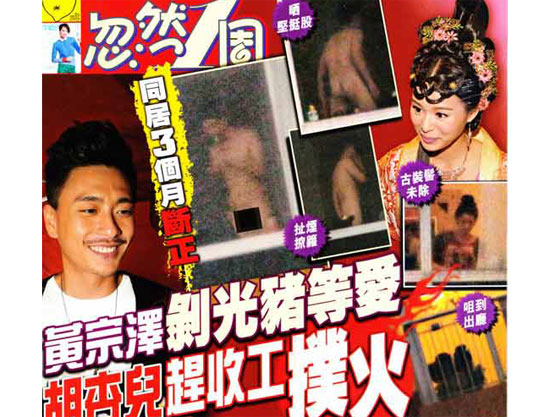
- Is the people's right to know so
important? If so, then why doesn't Occupy Central trio Reverend Chu Yiu-ming
explain who that secret donor is. That issue sits at the heart of Occupy
Central on trust and unexplained funding. Don't We the People have the right
to know who paid for Occupy Central?
- Johannes Chan is saying that he wants to
reserve the right to sue Leonie Ki for defamation.
(University
of Hong Kong, Law and Technology Centre, Community Legal Information Centre)
Any person who publishes (*note)
defamatory matter regarding another person or an organisation in writing
or by word of mouth or by conduct may be liable for defamation. Broadly
speaking, there are two kinds of defamation. They are: Libel, which is the
publication of defamatory matter in writing or in some other permanent
form, and Slander, which is the publication of defamatory matter by word
of mouth or in some transient (temporary) form.
(*Note: Under the law of defamation, the
meaning of word the "publish" is not confined in printing and distribution
of books/newspapers/magazines. It generally means "to make known to at
least one other person or the public by any means". More explanations can
be found in section III û conveying defamatory matter to others.)
The essential elements of defamation are
listed below:
a. the matter under dispute has a
defamatory meaning;
b. the defamatory matter is conveyed or communicated to a third party;
c. and the defamatory matter refers to a particular person (or company).
Great, but how does Johannes Chan prove
that Leonie Ki said what he said she did. "Well, there is this audio
recording that was published by Commercial Radio ..." How does the
magistrate know that the audio recording is authentic? Commercial Radio's
Stephen Chan is summoned to testify: "There is this person whose name I must
not tell because we have a confidentiality agreement ... this person
provided the recording to me and said that it was recorded at the HKU
Council meeting." However, Stephen Chan's testimony is only hearsay. Under
existing law, hearsay evidence is inadmissible, because there is no
opportunity for the other side to cross-examine the original
statement-maker. So can Johannes Chan induce the person who made the
recording to appear in court and be cross-examined?
If that person is one of the council
members, his/her reputation will be tarnished forever afterwards. If that
person is someone other than a participant in the meeting (e.g. a newspaper
reporter or a hacker), he/she will be charged with committing a crime.
- (Reuters)
November 8, 2015. Pope Francis on Sunday condemned the leak of sensitive
Vatican documents as a deplorable crime ... "Stealing those
documents is a crime, it is a deplorable act that does not help," he said.
Previously Hong Kong Localists
have taken action against the middle-aged mainland Chinese women singing on
the pedestrian mall of Sai Yeung Choi Street South (see
#284 and
#292). That action
is not altogether convincing because it involves ousting a certain group of
people but not explaining who should take their place instead.
(Oriental
Daily) October 26, 2015.
The middle-aged mainland Chinese
female singers at the Mong Kok pedestrian mall have been controversial.
Previously the Localists have harassed them, including by physical clashes.
However, it would seem that soft power is more effective than hard power. A
Facebook user posted the photos of a group of young girls by the name of Edit
singing next to the middle-aged mainland Chinese female singers, drawing the
audience over to their side. According to this Facebook users, residents
formed a volunteer corp to protect the young girls from being harassed by the
middle-aged mainland Chinese uncles. Other Internet users commented that the
young girls have won a technical knockout over the middle-aged mainland
Chinese women.
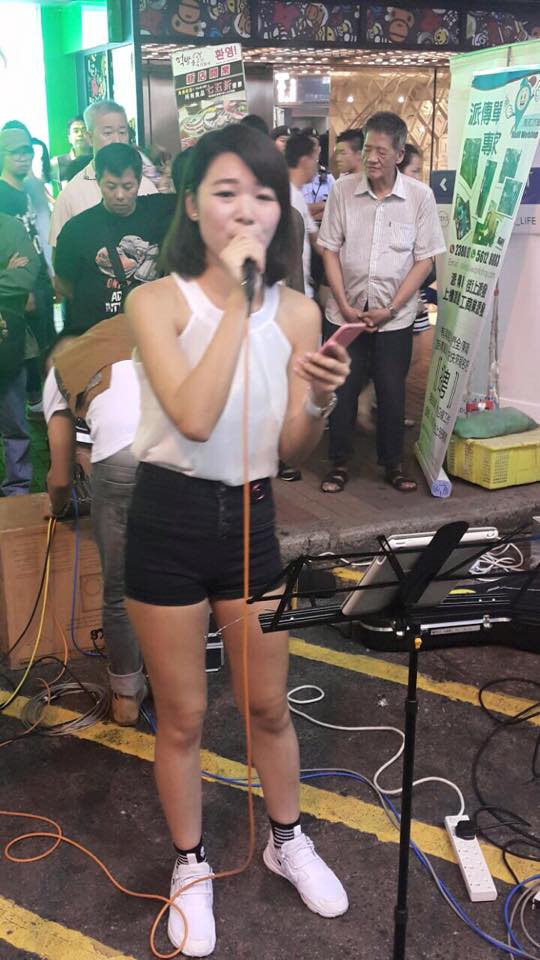
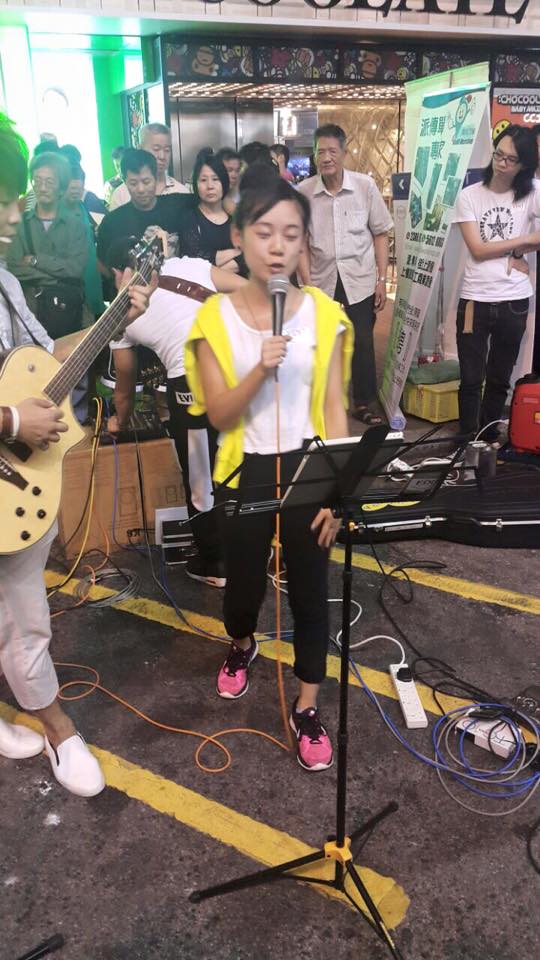
Internet comments:
- With due respect, these are
two pieces of pork chops, just like the middle-aged mainland Chinese women
except they are younger.
- With due respect, these are two street beggars, just like the middle-aged
mainland Chinese women except they are younger.
- Hey, that first girl couldn't even memorize
the lyrics so she had to read it off her mobile phone.
- But you should actually listen to their
singing:
https://www.youtube.com/watch?v=trd_BpP731Q
https://www.facebook.com/1640482902830291/videos/1662254137319834/
https://www.facebook.com/1640482902830291/videos/1662270703984844/
Well, the most important point
to note is that they are singing in putonghua. So if the Localists
complain that the middle-aged mainland Chinese women are polluting Hong Kong
culture with putonghua songs, then so are these girls. There is no
difference between them except that the girls are the daughters of middle-aged
mainland Chinese women.
Just as important is the simple fact that the singing was appalling. I would
have walked away from the scene quickly.
- You are wrong. Here are the middle-aged
mainland Chinese women singing in Cantonese
https://www.youtube.com/watch?v=dfoULFtEsVE! It must be most
disconcerting to see Hongkongers sing in putonghua and mainlanders
sing in Cantonese, and that having to take the opposite side of what should
have been obvious.
-
This is completely missing the core issue here. This is not a competition
with the grand prize being awarded sole rights to perform on a dais in the
Sai Yeung Choi Street South pedestrian mall. This is about public space
usage. Should the public space be allocated on the grounds of political
correctness as determined by certain people? Or on the grounds of the
aesthetic judgments of certain people? Or should public space be available
to every and any member of the public?
- The Localists are forced to say that they support democracy and therefore
they support equal access to public space. But they will quote "Animal
Farm" on how some people are more equal than others and therefore
the middle-aged mainland women are out of luck.
- Korean female idol Girls Generation singer
sings "The Moon Represents My Heart" in putonghua
https://www.facebook.com/ocnrm/videos/890397857718041/ . Time to
delete all their mp3's from your ipod because they hate
freedom/democracy/human rights/justice/universal values/universal suffrage.
Previously (see
#185), Loyalist
Militia member Man Shek and Civic Passion leader Wong Yeung-tat were going to
settle the future of democracy in Hong Kong by a boxing match. For unclear
reasons (with both sides giving completely different explanations), that match-of-the-century
never took place. Instead Man Shek and Wong Yeung-tat have had matches with
other boxers since.
On
July 6, Wong Yeung-tat was knocked out by his opponent in the first round.
https://www.youtube.com/watch?v=cQPJunxq-kk
https://www.youtube.com/watch?v=2A_yGKPZIfQ
On October 24, Man Shek fought
to a draw against 14-year-old Hung Cheung-kwun. During the match, Man Shek
struck a low blow against Hung.
https://www.youtube.com/watch?v=BTh0PubwhSc
https://www.youtube.com/watch?v=Mm_vJ4ixNuk
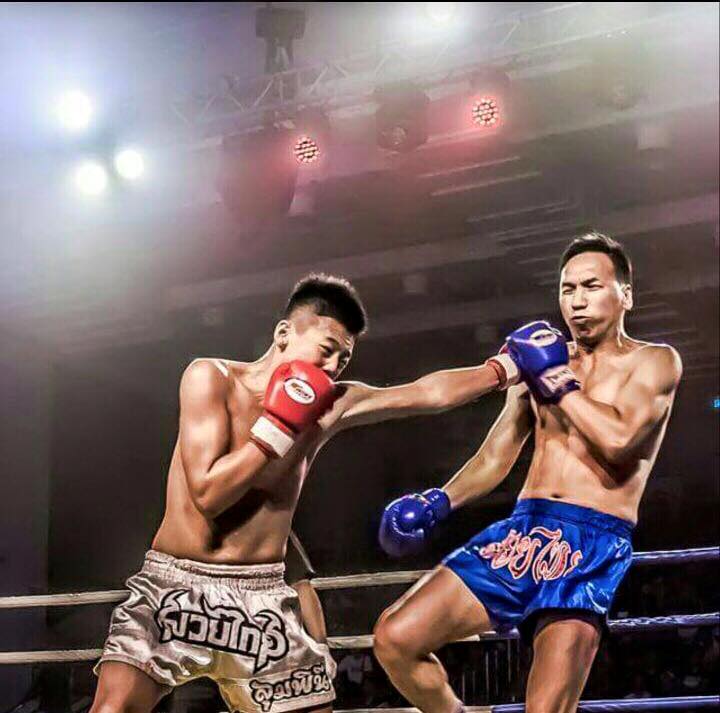
So, the future of democracy in
Hong Kong is still up in the air.
-
[354]
2015 District Council Elections - Part 5 (Radical Candidates)
(2015/10/27) The term "radical candidates" refer to candidates who are
affiliated with or supported by the so-called radical parties such as League
of Social Democrats, People Power, Civic Passion, Hong Kong City-State, etc.
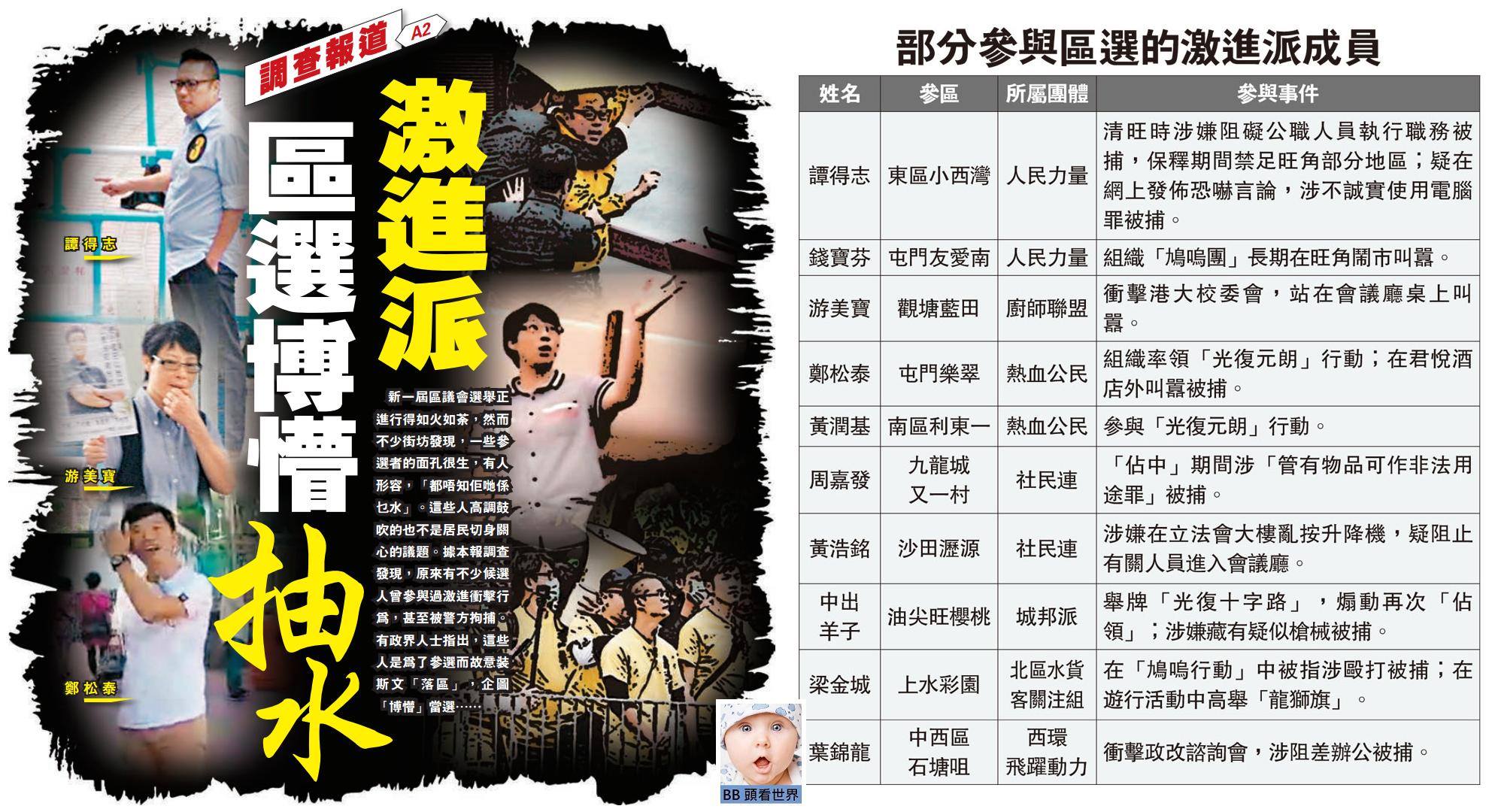
(Wen
Wei Po) October 27, 2015.
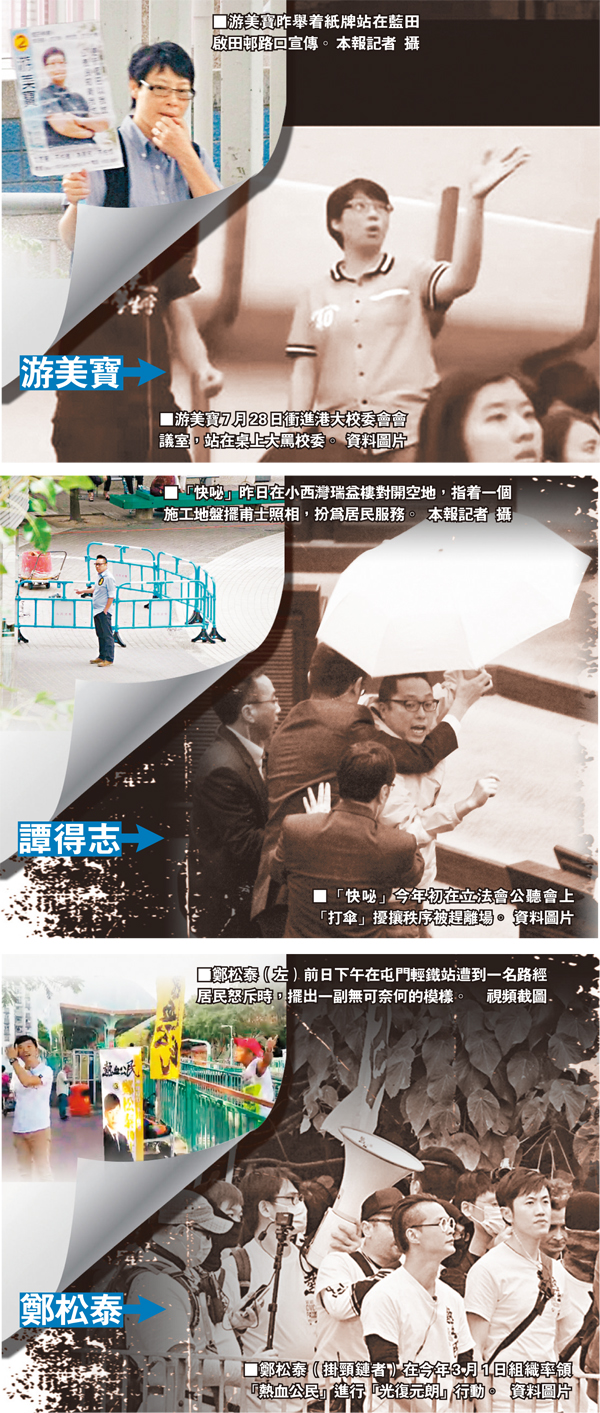
Yau Mei-Po, Tam Tak-chi (People Power) and Cheng
Chung-tai (Civic Passion)
Yesterday morning at around 7am, our reporter saw a middle-aged woman
holding a placard and smiling at passersby at the pedestrian overpass in Kai
Tin Estate (Lam Tin). The passersby did not pay her much attention. She is
Yau Mei-po, who is running for District Councilor in Lam Tin. She has
declared her occupation as "logistics manager" with no political
affiliation. Our reporter went through the records and found out that she
was the person who jumped on the table in the Hong Kong University council
meeting to scream and yell at the council members. She was also present at the Mong Kok shopping
revolution events, the July 1st march and the occupation of the IFC II lobby.
Previously, she said in a news interview that she was a "political novice"
and she was involved in the organization of the "Hong Kong Chefs Alliance."
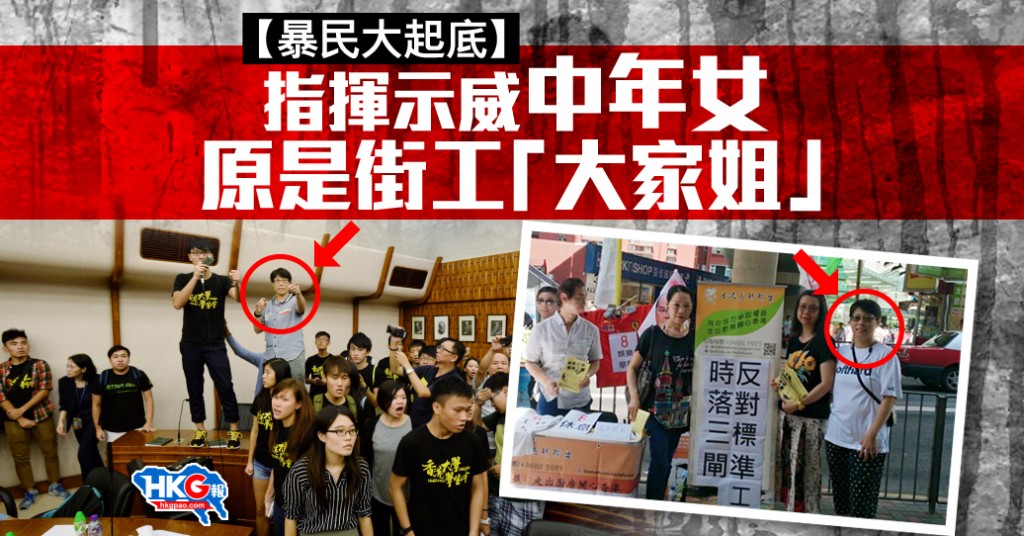
Our reporter interviewed a number of
passersby. They said that they have never seen Yau Mei-po setting up any
street booths prior to the election. They were not aware that she had
performed any service in the district. "She came out only after the election
began. I don't know what she's done before." A resident said that as soon as
the election is over, she is likely to vanish.
Meanwhile People Power's Chin Po-fun is
running in the Yau Oi South district in Tuen Mun. The Mong Kok shopping
revolutionaries have been controlled from behind the scenes by People Power,
and that was because Chin Po-fun organized a group of people who holler
every night along Sai Yeung Choi Street South. These shopping
revolutionaries have greatly annoyed the local residents and interfered with
local business activities. Chin Po-fun is parachuting into Yau Oi South
because People Power legislator Chan Wai-yip has an office in Tuen Mun.
Dickson Chau Ka-faat is running in the Yau Yat
Tsuen district in Sham Shui Po as a League of Social Democrats candidate.
According to information, Chau was in the same class year as former Hong
Kong Federation of Students secretary-general Alex Chow, and has himself
served as the permanent secretary of the Hong Kong University Students Union. Last
year during the prelude to Occupy Central, Chau was arrested by the police.
During the Occupy period, he took part in Mong Kok and Admiralty. Last
November 27 after Mong Kok was cleared, he was arrested by the police for
possessing "restricted materials for illegal purposes" while transporting
them from Mong Kok to Admiralty.
Yesterday, Chau and only two volunteers were
handing out leaflets outside the MTR station in Tat Chi Road. Very few
passersby took the leaflets. One resident told him: "Who the hell are you?"
This resident said that since this candidate has never been seen before
serving the community, he must be looking for exposure only through the
election.
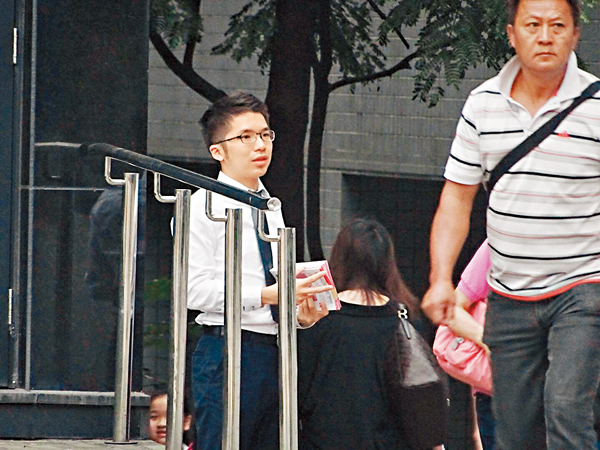
Dickson Chau Ka-faat
(Wen
Wei Po) October 27, 2015.
On the afternoon of the day
before yesterday, Cheng Chung-tai (nicknamed Hot Dog Worm) and other Civic
Passion (=Hot Dog) members were passing out leaflets by the Tuen Mun Light
Rail tracks. On the megaphone, they did not explain how they plan to serve the
community residents. Instead, they explained how they intend "to fight for
democracy." At this time, a Tuen Mun resident came up and pilloried Cheng
Chung-tai for causing trouble in the name of the so-called democracy and
having no intention of serving the community. He pointed his finger at Cheng
Chung-tai and said that the Hot Dogs should eat shit for causing trouble. This
resident had a very loud voice which almost drowned out the megaphone.
Faced with this angry tirade,
Cheng Chung-tai switched out of his gentleman posture and provocatively told
the man: "Don't touch me! Don't touch me!" The man refused to be incited and
said: "I won't touch you. I will only condemn you." So Hot Dog Worm backed
off, shook his head and stopped arguing.
Video:
https://www.facebook.com/308634672647539/videos/512537952257209/
Meanwhile, Wong Yeung-tat of Civic Passion
isn't even a candidate anywhere but he got more publicity than the 6 Civic
Passion candidates.
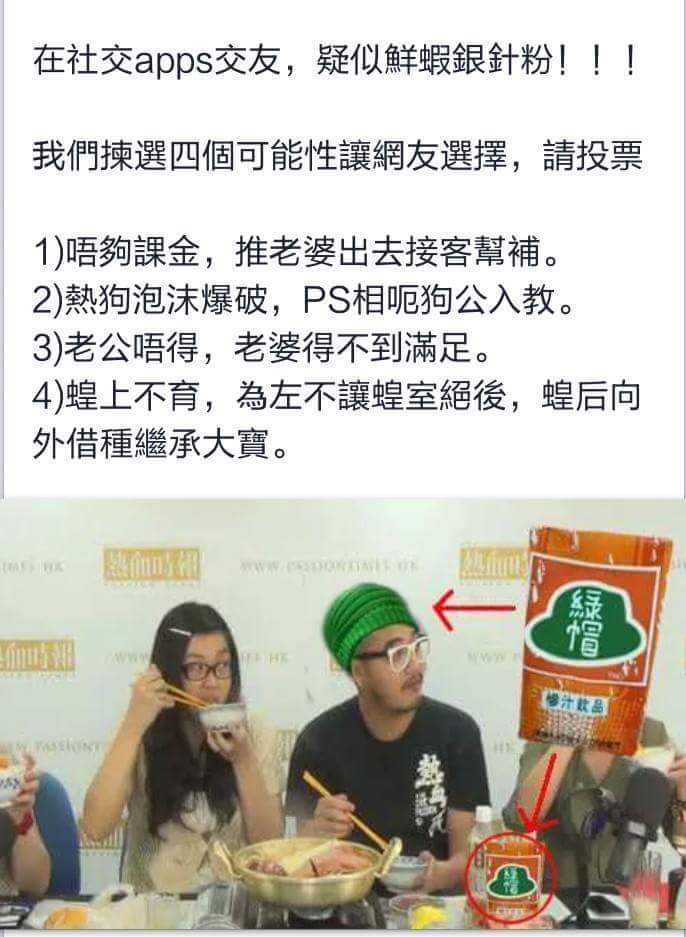
An Internet user posted about Wong Yeung-tat's 37-year-old wife being active on the social networking service
Tinder for
"friends, dates, relationships and everything in between." Therefore a
website has set up a poll to find the most plausible explanation:
(1) Wong Yeung-tat needs more money and therefore he is forcing his wife to
earn it with selling her body
(2) The Hot Dog bubble has burst, so they need to Photoshop photos to trick
people into joining
(3) Wong Yeung-tat is impotent and his wife can't get no satisfaction
(4) Wong Yeung-tat is infertile, so his locust queen needs to find semen
from someone else to establish an heir to the throne.
(Wen
Wei Po) October 27, 2015.
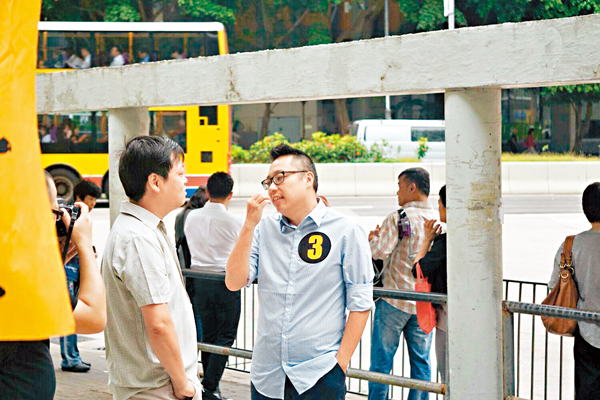
Yesterday morning at 8am, our reporter
observed that a number of volunteers set up People Power and Tam Tak-chi
flags near the Siu Sai Wan bus terminal. However, Tam was not present. About
30 minutes later, Tam showed up with a friend. Tam did not use the megaphone
to holler at the passersby as he normally does and he did not hand out
leaflets. He left these tasks for the volunteers to carry out.
Tam chatted with his friend, and then
he left to bring back a photographer to take some photos of
himself in the street. He walked over to a construction site near the Siu
Sai Wan Mall and began talking to the camera while pointing at the site, as
if he was "serving the people." Afterwards, he went over the result with the
photographer. He did not seemed pleased, and so the filming was done again.
After about 45 minutes, Tam left and entered
the Siu Sai Wan Mall. Five minutes later, the People Power volunteers packed
up and left as well.
Videos:
https://www.youtube.com/watch?v=Z0Ok3_EV9Xg Tam
Tak-chi and Chin Po-fun putting a show on for the media during the Mong Kok
Shopping Revolution in the fight for their unalienable right to step into the
middle of the road to block vehicular traffic. The other is a hidden member
DAB, Chu Yat-on. When I enter, my idea is bring political issues into the
District Council. Because Wong Kwok-hing intends to win the District Council
in order to become the Legislative Councilor from the District Council
constituency. That is, this is the prelude to the Legislative Council
election. Wong Kwok-hing voted in the Legislative Council against
investigating those responsible for lead-in-water, he supported the High Speed
Railway that is busting the budget, he is shepherding the Third Airport
Runway, etc. You can blame Wong Kwok-hing. As for Chu Yat-on, his big brother
is Chung Shu-gun ("Tree Gun"). I am talking about their shortcomings in the
Legislative Council. Therefore I am going to bring political issues into the
Siu Sai Wan community. I will definitely talk about civil nomination (of the
Chief Executive) and the elimination of the functional constituencies (in the
Legislative Council). Eh, the universal pension plan. I will talk about them.
As for the issues unique to Siu Sai Wan, it is simply three things. Firstly,
the MTR issue. That is, the traffic issue. The second issue is the building of
columbaria. A large financial group wants to build a large columbarium in Siu
Sai Wan. This is a livelihood issue that Siu Sai Wan has been concerned about
for a long time. That developer has not promised never to build this
columbarium. It has only been temporarily suspended. This is the biggest
difference between People Power and the pro-establishment camp. The
pro-establishment camp will hand over petition letters and post banners to
protest, but they won't organize the masses to hold a large-scale protest
action. People Power will do that. If the developer insists on building a
large-scale columbarium in Chai Wan or Siu Sai Wan, People Power ... that is
me representing People Power ... will organize the local voters in Siu Sai Wan
to hold a large-scale popular resistance action to show the power of the
people. This is the biggest difference between us as a popular resistance and
the pro-government camp. The third issue is the market issue. LINK REIT has
renovated a market in Chai Wan. So far prices at that market is slightly
higher than at the Chai Wan market. I have spoken to residents and they don't
think that this is too much. I am watching that market to see if this is
happening only when the market was newly opened but they will raise prices
after a couple of weeks. These three issues: traffic, market, columbarium.
Three important community issues. These are my ideas for the election in Siu
Sai Wan. Thank you.
https://www.youtube.com/watch?v=94zDB4qr7r8
I am a candidate in the Siu Sai
Wan district of Eastern District. Tam Tak-chi, People Power. My district has
two pro-establishment candidates. One is Wong Kwok-hing of the Federation of
Trade Unions.
Internet comments:
- What do they do at the
District Councils?
(Wikipedia)
Functions
The councils are mandated to advise the
Government on the following:
- matters affecting the well-being of
people in the District;
- the provision and use of public
facilities and services within the District;
- the adequacy and priorities of
Government programmes for the District;
- the use of public funds allocated to
the District for local public works and community activities; and
District Councils also undertake the
following within the respective districts with its available funds
allocated by the Government:
- environmental improvements;
- the promotion of recreational and
cultural activities; and
- community activities
Do you see any part about the
District Council bringing "democracy" to the people? The Legislative Council
has the function of voting on legislation that regulate the elections of the
Chief Executive and the Legislative Council. For example, the pan-democrats
vetoed one-person-one-vote for the Chief Executive on the grounds that there
is no civil nomination. The District Councils do not have that kind of
function. They will vote on issues such as how to allocate the government's
$100 million grant (e.g. build an escalator up the hillside? or build a
bicycle/jogging path by the river? or build a musical and colorful water
fountain?).
Relevant link: Hong Kong Free Press
HKFP Explainer: Hong KongÆs 2015 District
Council elections
- The Legislative Council elections are based
upon proportional representation. For example, there were six open seats in
the Kowloon West district, going to the top six vote-getters. As a result,
there were three pro-establishment legislators and three pro-democracy
legislators.
The District Council elections
are based upon one sole winner in the district. It's
Winner Takes All or first-past-the-post. So if the winner is
someone who has never shown up before and came in now to "fight for
democracy", you may have a hard time finding him/her to help you with your
community problems. For example, your front door becomes an illegal garbage
dump, but you can't find your district councilor to help because he/she is too
busy running the Shopping Revolution in Mong Kok at nights, protesting the
appointment of the Hong Kong University pro vice-chancellor, stopping parallel
traders in Sheung Shui, etc.
- There are 18 district councils and each has
a majority of pro-establishment councilors. So if a radical councilor wants
to air an issue (such as having the council made a declaration of support to
civil nomination for the Chief Executive or the elimination of the
functional constituencies in the Legislative Council, that motion will be
voted down with certainty. What can the radical councilor do? Throw an egg at
the wall and be ejected? That's a good way to earn the HK$30,000 per month
salary while fulfilling your campaign promise.
- What is for certain is that
none of these candidates from radical political parties have the courage to
hold a yellow umbrella high and chant loudly "I want genuine universal suffrage" as
their campaign shtick.
-
In discussing mainlanders, there is the category of "Double NO's" --
children neither of whose parents are Hong Kong residents, but they
nevertheless enjoy all the Hong Kong benefits because they were born in Hong
Kong themselves.
In
discussing the District Council elections, there is also the category of
"Double NO's" -- candidates who do not live in the district and who have
never provided community service before, but who have now air-dropped into
the district to earn a political reputation.
- (VJmedia)
October 29, 2015.
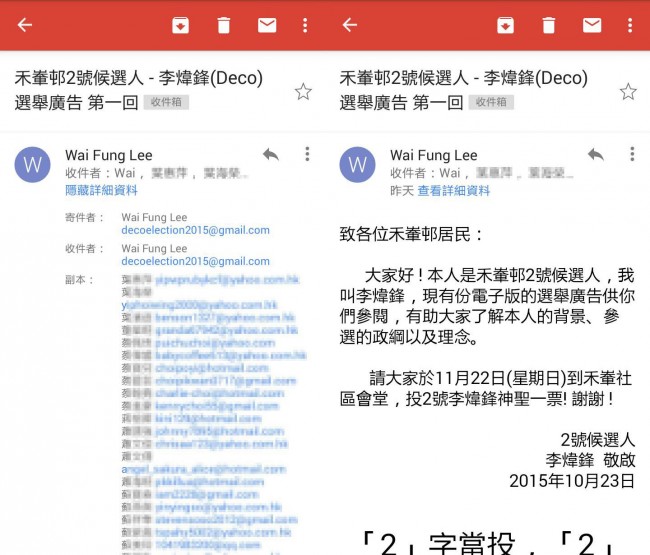
Deco Lee Wai-fung is th People Power candidate
for the Wo Che district in Sha Tin. On October 23, he sent out his first
campaign email. However, he made the cc: list visible to all recipients.
This came right after a Democratic Party candidate did exactly the same
thing and caused a ruckus. What can you do with a candidate with
a doctorate degree but who doesn't know how to use "bcc:" (blank carbon copy).
- Civic Passion Cheng Chung-tai's campaign
poster with the Goddess Kuan Yin:
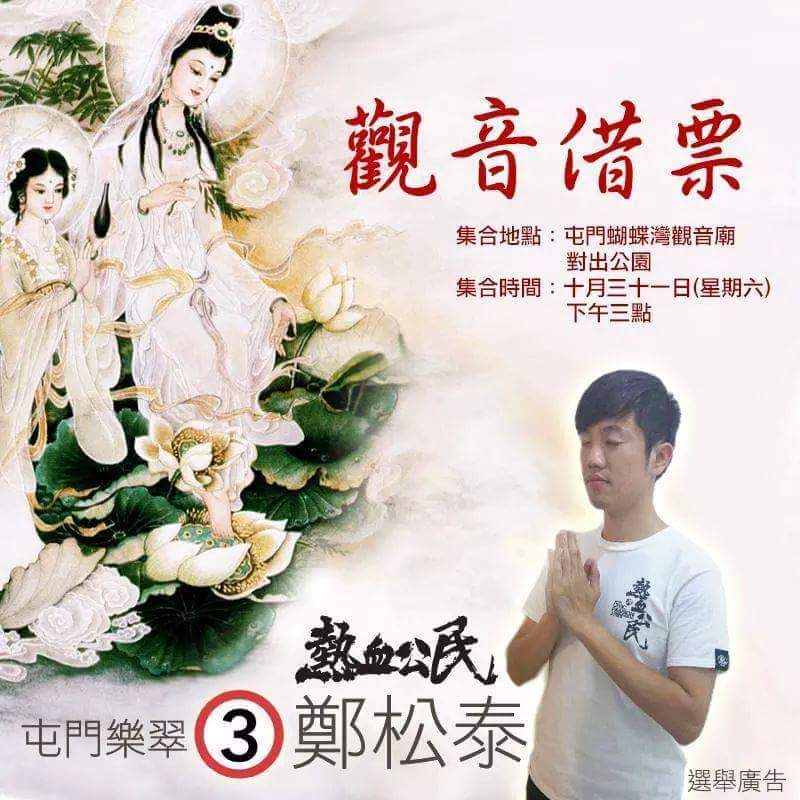
- Scenes stolen from the
Young and Dangerous (Teddy Boy) films about Hong Kong triad
gangsters.
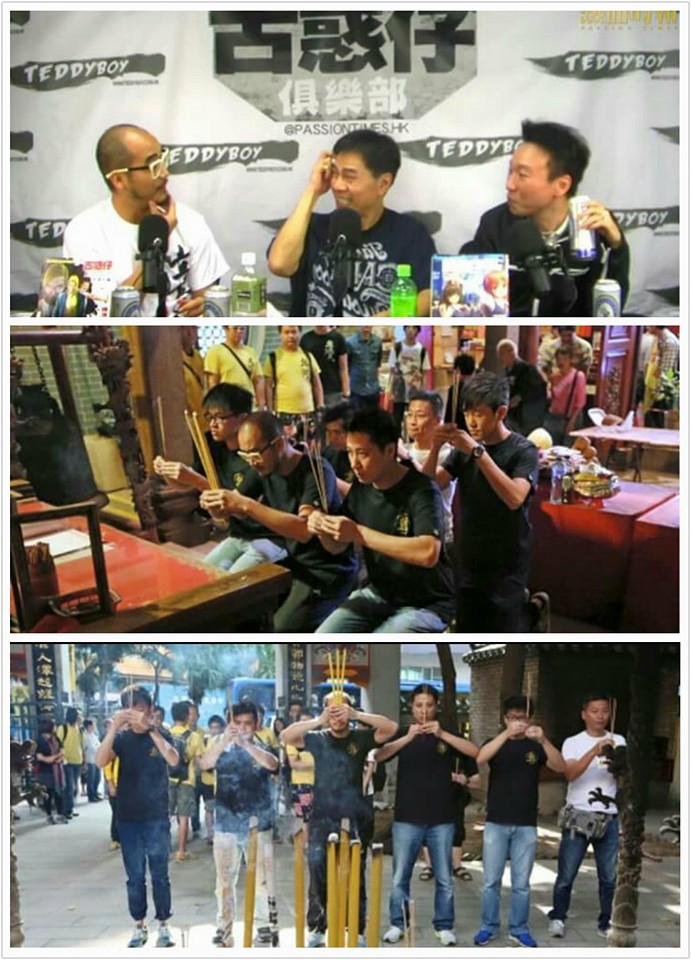
This event took place at Lord Guan's Temple in
the Sham Shui Po district. According to history, Lord Guan was born in
Yuncheng city, Shanxi province, China. He never visited Hong Kong (which was
an uninhabited island) during his
lifetime. So it is hard to see how Lord Guan would care to bless a bunch of
Hong Kong localist revolutionaries who insist that they are not Chinese.
- Civic Passion's Passion Teens Monthly front
cover
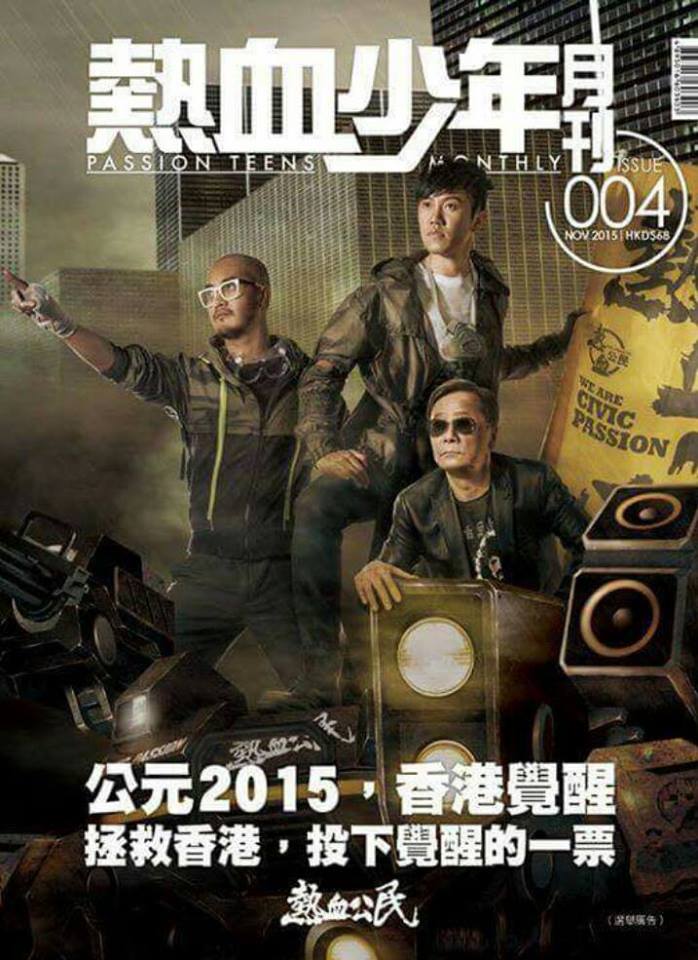
AD 2015, Hong Kong awakens
Save Hong Kong and cast a vote of awakening
Civic Passion
This
is an image remake from October 2014:
https://www.youtube.com/watch?v=h4N22ciH_4k, a people-versus-police
struggle which turns out to be about a turf battle against other radical
political parties:
https://www.youtube.com/watch?v=B2C4ywNF9LI and
https://www.youtube.com/watch?v=V9Vmf19ydJ8
(HKG
Pao) October 26, 2015.
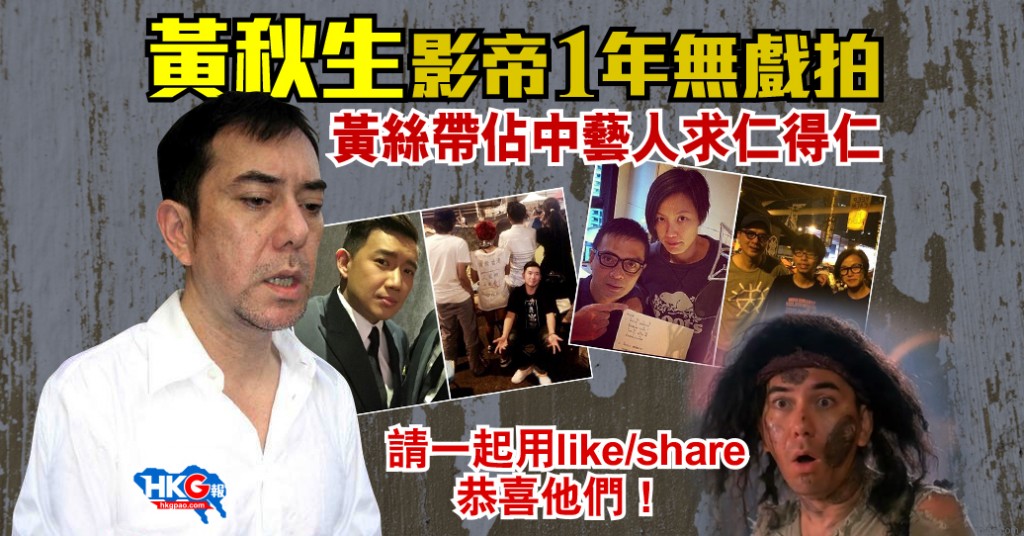
Last October during Occupy Central, the
director Wong Jing named the pro-Occupy actor Anthony Wong, actor Chapman To
and singer Denise Ho as three persons with whom he had previously
collaborated satisfactorily with and whose political positions he respect.
However, he disagrees with their positions on Occupy Central and, to avoid
further embarrassment, he
has deleted the contact information of the three. This led to a verbal war
between the two sides.
Recently Anthony Wong posted about the new TVB serial drama <Lord of
Shanghai>. He said that "this drama is the best proof that during this time
last year, I was in Shanghai filming and away from Hong Kong. Therefore, you
should not be accusing me of being in some Occupy or the other. I cannot be
present in both places at the same time. If you persist with that
accusation, you will have to explain how I can manage to do that." So it
seems that Anthony Wong wants to dissociate himself from Occupy Central.
Why is Anthony Wong doing this now? Recently
Anthony Wong told <Ming Pao> that he hasn't been in any movies recently. "If
this continues, I can't see any improvement. This big change has led me to
see the other side of me."
However, Wong Jing immediately responded to
Anthony Wong's post: "You were indeed away from Hong Kong at the time. But
you posted pro-Occupy messages every day! If you have the guts, why don't
you Anthony Wong say: 'I, Anthony Wong, am opposed to Occupy Central and I
support the August 31st resolution of the National People's Congress Standing
Committee on universal suffrage!'? I will retract all my criticisms of you and
apologize to you!" Anthony Wong did not respond to Wong Jing's
counter-attack.
During
the <Ming Pao> interview with Anthony Wong, he kept criticizing the
deteriorating quality of the TVB production and actors. At the same time, he
revealed that he has had no film offers over the past year and therefore has
to take to television.
Meanwhile what has happened to the other pro-Occupy entertainers such as
Denise Ho, Chapman To, Wong Yiu-ming and Gregory Wong?
During the Occupy period, Denise Ho
"separated" amicably from the MediaAsia with which she previously had a
10-year contract. She became an independent singer. She said: "The workload
is clearly a lot less. As a singer, there was practically zero jobs,
commercial performances and event appearances. If there are offers, they
come from Hong Kong. There are no offers from mainland China." In the two or
three years before, she had a lot of mainland Chinese offers. Therefore, she has
lost about 80% to 90% of her income compared to the pre-Occupy period. Her Sina weibo account has also been deleted.
During the Occupy period, Denise Ho considered
entering politics. In June this year, she gave up that idea because "she was
not suited for power games." But she insisted that she has no regrets in
joining Occupy Central. She said that Hong Kong has 7 million plus persons
and that it still a big market.
Meanwhile Chapman To has not appeared in
mainland since. During Occupy Central, To was in the forefront. Last March,
he also offered Facebook support to the movement to oppose the Cross-Strait
Service Trade Agreement in Taiwan. In May this year, there were two films
<Let go for love> and <Aberdeen> with Chapman To shown on mainland China.
Chinese fans organized mass boycotts so that the box office receipts were dreadful.
The production company of <Let go for love> acknowledged five days after the
premiere that "Chapman To was immoral and we made the wrong choice." In the
last film that he took part in on the mainland, <That's incredible>, his
entire presence was edited out.
Two to three years previously, Chapman To was
already a controversial figure in mainland China. He cursed out mainlanders
for their poor qualities and he arrogantly declared that he did not care for
the mainland market. This caused his films to be shelved indefinitely. Even
those films in which he had a cameo appearance were affected.
Meanwhile Wong Yiu-ying who joined Denise Ho
in the Hong Kong Shield, a group formed by theatrical and musical
professionals during the Umbrella Movement to monitor police brutality and
violence in general and Gregory Wong who was much promoted by Ricky Wong's
HKTV television station have both found that many theatrical and musical
companies won't work with them because they supported Occupy Central.
Anyway, this is what they asked for and they
got it. We believe that they are at peace with the outcome, and so is
everybody else!
(HKG
Pao) November 20, 2015.
Apple Daily has given Anthony Wong 3/4 of a
page for an interview. Basically, it is repeating the assertion by Anthony
Wong that he is not Yellow Ribbon and he does not support Occupy Central!
Wong says that the mainland ban order was mistakenly applied to him. He
said: "Whatever I think, whatever I say, whatever I do ... I cannot control
how people interpret them."
Could it be that everybody misunderstood him?
That he was never a Yellow Ribbon? Is that true? Was he misunderstood or
framed?
If you can't figure out if you framed him,
we'll give you a hint: in this Apple Daily interview, he said "I don't have
any film assignments" three times, "economic pressure" four times,
and "he is
experiencing an economic crisis because he has to responsible for the
livelihoods of more than a dozen people." It is one thing for politicians to
make emergency appeals right before election day, but it is something else
for an actor to beg for work!
So who is next to tell Apple Daily that they
are not Yellow Ribbons? Alan Leong? Lee Cheuk-yan? Benny Tai? Joshua Wong?
...
Internet comments:
- Denise Ho says that Hong Kong
is a big enough market in itself. This is true only if you assume that this is
a homogenous market in which everybody will support a Yellow Ribbon
singer/actor. This is not true for many reasons. Firstly, this is not a
homogenous market, especially since the Yellow Ribbons have caused deep
fissures. As soon as you declare your politics, some people will adore you
while others will hate you. Secondly, the Yellow Ribbon singer/actor must still have a quality
product. Singing forgettable songs won't sell no matter what your political
position is. For reference, please see what happened to Ricky Wong's
HKTV.
- When they supported Occupy
Central, they were doing something that hurt people's livelihood. Afterwards
they are complaining that their own livelihoods are being hurt. They should be
asked to settle the bill first.
- Please note that this is not a question of
the Chinese Communist government cracking down on these actors/singers. As
Anthony Wong noted himself, he was busy filming TVB's <Lord of Shanghai> in
Shanghai during the Occupy Central period. So it wasn't as if the government
banned his person or his projects from mainland China. Ditto for the others.
- The problem was that there were popular
boycott movements. Regardless whether these boycotts were spontaneously
organized initially or not, mass participation was widespread. In the case of
<Aberdeen>, the production/distribution company attempted to buy tickets
themselves to boost box office receipts, but that was detected by the
Internet users and publicized for even greater negative publicity. In the
end, no company would hire these people because any products associated with
them won't sell. Thus <That's incredible> had Chapman's role edited out
altogether.
- (HK01)
January 13, 2017. In 2013, a 3D comedy <That's incredible> was made in China
with an investment of almost 100 million RMB. The stars were Chapman To,
Wang Bao-qiang, Xiao Shen-yang, etc. The filming went smoothly and then came
Occupy Central. According to one of the principals: "At the time, Chapman To
was completely banned in terms of showing and advertising him in movies. In
other words, the entire investment would go down the drain! What to do? The
sunk costs were 100 million RMB already.
Ultimately, the movie company hired Asian
Entertainment Group and the special effects company Studio 51 for
post-production work. Every time that Chapman To appears in the movie,
face-shifting computer graphics is used to transplant the mainland actor
Xiao Peng onto him. "The image of Chapman was cut off and replaced by Xiao
Peng playing the same scene from the same angle to a green background. The
result was so good that you cannot detect any edge effects even on a 4K
movie. You could not tell that another person was inserted to get slapped in the
face." The post-production work cost 20 million RMB, but <That's Incredible>
raked in more than 100 million RMB at the box office in late 2015 and
recouped a sizeable proportion of the investment.
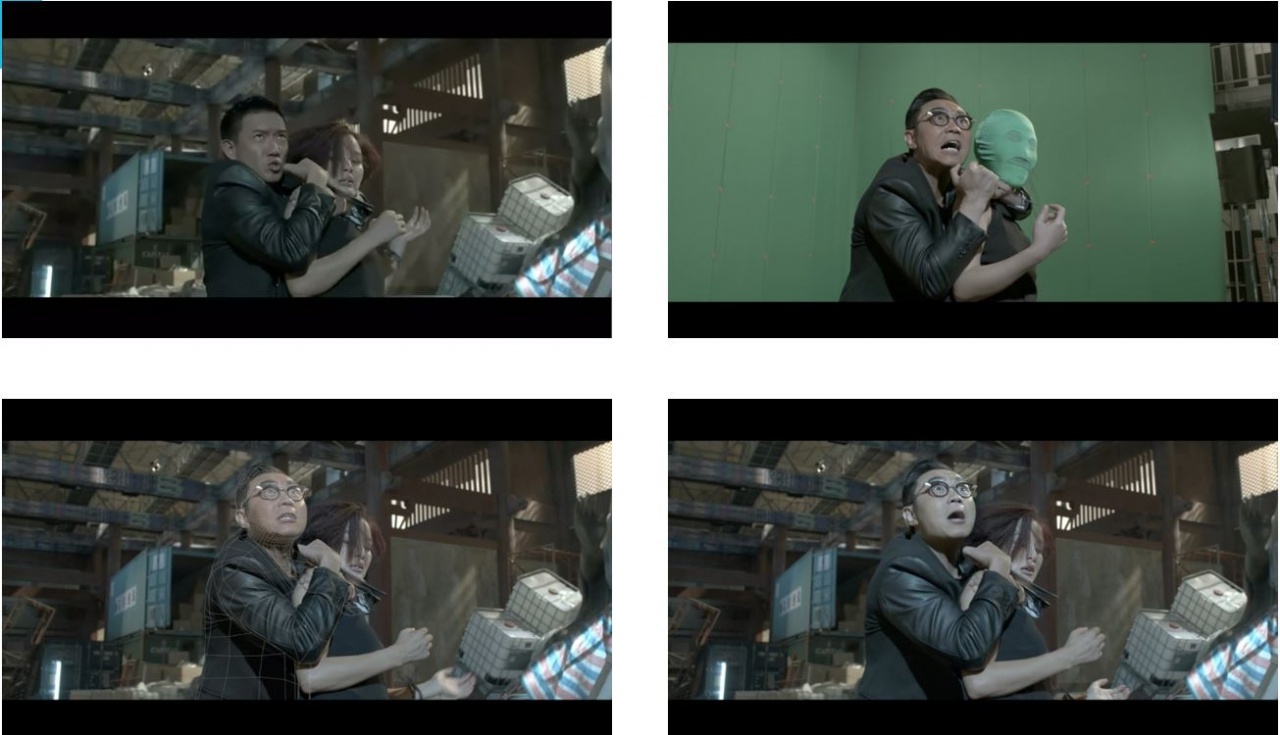
- Chapman To wrote about something that
happened in Tai Po. He said that he saw an ambulance being blocked on the
left lane and unable to proceed because the centre lane. At the time, the
right lane was free of traffic. He saw that the first car on in the centre
lane moved to the right lane, and all others in the center lane followed the
lead. The center lane was thus opened for the ambulance to go through.
Chapman To commented: "This is Tai Po! This is China! It may not be possible
in other countries!"
However, many Internet users don't buy into
what Chapman To had to say. They said: "When you occupied Central
previously, you caused hundreds of thousands of people not being able to
take buses, taxis, minibuses, trams and cars in Hong Kong. Why didn't you
make way for them to get to wherever they needed to go? Or do you think that
they didn't have to go anywhere?"
As for "it may not be possible in other
countries", there are plenty of
videos of the same action coming from other nations (e.g. China and
Germany). It is a civic duty to make way for ambulances.
- (SCMP)
October 1, 2014.
Protest leaders will set up "humanitarian corridors" to
allow emergency vehicles to pass through their occupation zones, after a
big drop in the number of fire engines and ambulances meeting the
12-minute target response time.
Police say protesters have occupied 3,670 metres of road:
600 metres of Harcourt Road in Admiralty, 1,100 metres of Gloucester Road
in Wan Chai, 470 metres of Hennessy Road in Causeway Bay and 1,500 metres
of Nathan Road in Mong Kok between Boundary Street and Waterloo Road.
The Fire Services Department said the proportion of
ambulances on target in Central had fallen from 90 per cent to between 62
and 70 per cent. No figures were provided for other districts.
"So far, we have received no reports of any
death or big fire," Deputy Chief Fire Officer Leung Wai-hung said. "But this
is what we are trying to prevent." He said paramedics had to take a patient
with a sprained ankle to hospital by MTR because of blocked roads, taking 43
minutes from the time of his call.
The Occupy people had to be shamed into
fulfilling their civic duty.
- China today is completely
different today as they have all manners of macro-motives and micro-movies. The Hong
Kong young wastrels are still stuck twenty years ago and think that China only
has patriotic-themed government-made propaganda movies. They really need to
open their eyes and learn.
- As Chow
Yun-fat said, at worst he'll just earn less money. Of course, Chow has
already made a fortune as a billionaire so he doesn't care anymore. Can you?
- Should the mainland Chinese have protected
the freedom of expression of these actors/singers? Well, if someone comes
and calls you a stupid pig, must you pay money to protect his/her freedom of
expression? No. You should exercise your own freedom of expression/assembly by
boycotting that person and make sure that everybody else who has been called
stupid pigs by that person do so as well.
- Denise Ho complains that the Hung Hom
auditorium won't rent to her. Well, when more than one group wants to
apply for use on the same date, the decision will be determined by these
factors
(1) the nature, importance and attractiveness of the planned events
(2) the advantages of the planned events
(3) the track record of the planned events/performers/applicants
She should reflect on these factors rather than blame everything on
political oppression by Chief Executive CY Leung. By the way, does CY Leung
even know who Denise Ho is?
(am730)
October 23, 2015.
Li Ning is the chairman of two
listed companies -- Li Ning (2331) and Extraordinary China (8032). Apart
from seeking investment opportunities in China, he has been seeking ways to
repay the motherland. In the past several years, he has established Li Ning
Sports Parks, first in his hometown of Xining (Guangxi), then in Nanyang (Henan)
and then in Yangzhou (Jiangsu). Over the past weekend, he was in Yangzhou
for the opening ceremony and he was interviewed by us in the brand new park.
Li Ning was a sportsman
nurtured by the state. After he migrated to Hong Kong and made money from
his businesses, he did not leave the motherland. Instead he repaid the
motherland. So he should be a model businessman in the eyes of mainland
official media. Nobody would question his patriotism. But it is up to him to
tell us about his feeling about Hong Kong.
"I think that Hong Kong has
always been a world that is based upon putting in the effort to realize a
dream. An ordinary person can keep elevating himself in this world." Li Ning
seems to be talking about the story of a place in which an immigrant has
plenty of opportunities, but he seemed to be lack a deep perception. After
all, no place can be free of trouble. As a immigrant, he may be detached.
But he cannot evade the issue of mainland-Hong Kong conflict because he has
Chinese blood flowing in him.
"Conflicts are natural. But
other that those who lived in the fishing village back then, who hasn't
traveled from mainland to Hong Kong!" But how do you react when you
see Hongkongers quarrel with mainlanders? "I think that some people are
stupid, and some people are causing trouble." What about the fans booing the
Chinese national anthem during the FIFA World Cup qualifying matches? Li
Ning who has won 14 world championship titles and enjoyed the glory of
listening to the Chinese national anthem innumerable times should have some
feeling replied: "I think that they lack a little bit of culture. This
should not be the behavior of someone who has received education in a large
city. This should not have happened."
Although booing the national
anthem may be related to the Chinese national team's racist poster,
somewhere back there is the issue of Hong Kong identity. Certain Hongkongers
insist on writing down Hong Kong as their identity. Our reporter asked Li
Ning how he would respond if asked whether he is Hongkonger or Chinese? Li
Ning did not respond directly, but only smiled and laughingly said: "That
person who posed the question is being silly."
This is perhaps the difference
between Li Ning who is in between Hong Kong and Chinese identities but never
bothered by it and those Hongkongers who grew up with a colonial-era
education. Li Ning does not think that there is anything that is right or
wrong. "It's because you are used to being colonized, so you think that the
colonial culture is normal. Therefore you say that you are Hongkonger and
not Chinese. That's very normal. It will take time to change that."
"It is a good thing for Hong
Kong to have different voices. There is nothing to be afraid of. But please
don't take extreme actions. When you use extreme actions to express your
demands, you may seem to be attacking someone else, but you are actually
hurting yourself. That's unnecessary." What he refers to as "extremism"
includes not just the anti-parallel trade clashes, but also "Occupy
Central."
After 79 days of Occupy
Central, every Hongkonger must feel something. At first Li Ning shaked his
head and said that he did not visit the scene. He said: "I am not very
sensitive about that." But he couldn't help himself and he added: "I feel
all along that certain things should not be done by extreme methods.
Extremism causes aftereffects, which damage ordinary citizens but not the
big shots." Then he gave a little smile after saying this.
To relieve the problem, Li
Ning had another suggestion beyond just making changes slowly. "Hong Kong
has certain values that should not be discarded, except for colonial
culture. I think that unless the colonial culture is discarded, Hongkongers
won't know that they are Hongkongers. When Hongkongers don't even admit that
they are Chinese, then they are not Hongkongers."
Our reporter asked: If
colonization is a part of Hong Kong history, then how can it be erased? This
is the reason why Hong Kong is different from mainland cities. Li Ning
rebutted: "It is not unusual for cities to be different. The Shanghainese
people and the Guangzhou people can't stand each other. Beijing people don't
like Tianjin people. That's normal. There is nothing wrong with these types
of conflicts. But it is absurd to say that Hong Kong and China oppose each
other. Why is that necessary?" He explained that the purpose of
de-colonization is to remind people not to be affected by the emotions induced by
colonization. It is normal for cultural differences to exist among
regions, including those uncivilized behaviors of certain mainlanders.
He asked the reporter: "Are
they very civilized when they go to Japan? Are they civilized when they go
to Europe? As a cosmopolitan city, Hong Kong should be more tolerant and
accommodate everybody. If you start saying that this person will be allowed
to enter but that person won't be allowed, then I don't understand the
meaning of a cosmopolitan city."
The cosmopolitan city Hong
Kong
attracted Li Ning to bring his company for stock market listing in 2004. But
he said frankly that this was because he did not have the same opportunity
in mainland China which was not as open as today. Now that things are
different, would he have gone to mainland to get his company listed? Li Ning
said, "That's possible!" He said: "The world is changing. Hong Kong is not
as good as Shanghai. Today all their resources are concentrated in Shanghai.
How can you compare?" He gave the example that if Disneyland were completed
simultaneously in Hong Kong and Shanghai. Where would foreigners go? "Hongkongers
surely think that they will come to Hong Kong. Wrong! Because Shanghai
represents China. If I were a foreigner, I want to go to China so as to
understand the country."
If as he said, Hong Kong is
being marginalized as predicted, Li Ning assured us: "The rise of China
does not mean the decline of Hong Kong. This is not a logic. Hong Kong can
also rise, but we need to find a reason. That reason is not politics. It is
culture, economics and values."
But politics is linked to
culture, economics and values. How can they be severed? "You are correct.
Therefore you cannot be extreme. Extremism has costs. What takes only one or
two years to do will take three or five years to accomplish." He said: "Hong
Kong is going to do well, but you cannot simply compare it with Shanghai.
You cannot simply set it up in opposition to China. You should allow them to
use each other's resources to develop Hong Kong. You should know that there
is not only China, but also the whole world."
Video:
(YouTube)
Li Ning lights cauldron of the Beijing Olympics Games
Internet comments:
- I see some people are
criticizing Li Ning because he dared to say: "When Hongkongers don't even
admit that they are Chinese, then they are not Hongkongers." Look, Li Ning
is a legal immigrant. As a Hong Kong resident now, he has freedom of
expression. So let him speak his mind.
- No. The Chinese Communist tyrants approved Li Ning to migrate here. The
people of Hong Kong did not approve this action. Someday after Hong Kong
builds its own nation, we will strip Li Ning of his residency rights and
demand reparations (more precisely, by confiscating his entire personal
wealth) for saying "When Hongkongers don't even admit that they are Chinese,
then they are not Hongkongers." I'll remember this, he will pay.
- Brother, did you forget to take your medication again?
- Let's see how this person
from Hongmei town, Dongguan city, Guangdong province, China answers the
question "Where are you from?"
If he goes to Dongguan city,
he will say that he is from Hongmei town.
If he goes to Guangzhou
(capital of Guangdong province), he will say that he is from Dongguan
city.
If he goes to nearby Fujian
province, he will say that he is from Dongguan city in Guangdong province.
If he goes to Heilongjiang
province (in faraway northeastern China), he will say that he is from the
south (or Guangdong province).
If he goes overseas, he will
say that he is from China (or that he is Chinese).
If he goes to outer space,
he will tell the extraterrestrial beings that he is from Earth.
So the answer to "Where are
you from?" actually depends on the identity of the person who is asking. You
have to answer at a level that he can grasp.
- It is pointless to tell
someone in America that you are from Hongmei. "Where is that? Oh, in China?
What don't you just say so?"
Only in Hong Kong (which is a
part of the People's Republic of China according to the local constitution
known as the Basic Law), some people cannot bring themselves to tell
Americans or ETs that they are Chinese, even if the Americans or ETs know
that they are just that.
- Localisation is a historical
process. That is an undeniable fact which I did not make up. You cannot deny
the historical truth. Hong Kong was economically surging in the 1980's and
1990's. But after the handover, poor-quality Chinese immigrants arrived
and they enabled the Chinese Communists to hijack our city politically. As a
result, Hong Kong is retrogressing. That is why the revolution is coming
inevitably.
- Wake up! Are you stupid or what? Everybody knows that hundreds of thousands
of so-called poor-quality Chinese crossed over the border illegally into
China in the 1950's, 1960's and 1970's. Real Hongkongers did not ostracize them. On the contrary we worked
and attended school together. The economic rise in the 1980's and 1990's
came through the efforts of these poor-quality Chinese. But we never
expected that their descendants would turn out to be poor-quality
Hongkongers today. Or perhaps they are just poor-quality Chinese wastrels.
- For the 18 years since Hong
Kong was handed back to China, it has been a city that welcomed immigrants.
Hong Kong is a free port with low tax rates and a higher degree of freedom
in living, expressing and traveling. Unless you impose a dictatorship to
lock down Hong Kong, it will continue to be an open city that welcomes
qualified immigrants to live here. The so-called localization process is
just camouflage for a dictatorship of those who were born here. Culturally
speaking, there are many immigrants from places other than mainland China
(such as India, Vietnam, Taiwan, Japan, United States, United Kingdom, etc)
who don't speak Cantonese and don't follow the local culture. What are you
going to do about them? Put them on boats and push them off shore?
- 150 immigrants are coming
from mainland China to Hong Kong every day, and that is the Chinese
Communists' plot to take over Hong Kong by the numbers. Most of those coming
under this scheme is allegedly for the purpose of family re-unification. For example,
a Hong Kong male marries a mainland woman and applies for her to come to
re-unify in Hong Kong. This can be stopped completely if no Hongkonger
is allowed to marry outside of Hong Kong.
- That is debatable. Hongkongers should not be allowed to marry mainlanders
all of whom are of poor quality, but they can marry high-quality outsiders
from elsewhere (e.g. United States (whites only)/Europe/Japan but not Latin
America/Africa/India/Pakistan/Middle East). I am not being racist here. I am
just abiding by the scientific principles of
eugenics.
It is nothing person; it is just plain good science.
-
Hong Kong Basic Law Article 24
Article 24 Residents of the Hong Kong
Special Administrative Region ("Hong Kong residents") shall include
permanent residents and non-permanent residents.
The permanent residents of the Hong Kong
Special Administrative Region shall be:
( 1 ) Chinese citizens born in Hong Kong
before or after the establishment of the Hong Kong Special Administrative
Region;
( 2 ) Chinese citizens who have ordinarily resided in Hong Kong for a
continuous period of not less than seven years before or after the
establishment of the Hong Kong Special Administrative Region;
( 3 ) Persons of Chinese nationality born outside Hong Kong of those
residents listed in categories (1) and (2);
( 4 ) Persons not of Chinese nationality who have entered Hong Kong with
valid travel documents, have ordinarily resided in Hong Kong for a
continuous period of not less than seven years and have taken Hong Kong as
their place of permanent residence before or after the establishment of
the Hong Kong Special Administrative Region;
( 5 ) Persons under 21 years of age born in Hong Kong of those residents
listed in category (4) before or after the establishment of the Hong Kong
Special Administrative Region; and
( 6 ) Persons other than those residents listed in categories (1) to (5),
who, before the establishment of the Hong Kong Special Administrative
Region, had the right of abode in Hong Kong only.
The above-mentioned residents shall have
the right of abode in the Hong Kong Special Administrative Region and
shall be qualified to obtain, in accordance with the laws of the Region,
permanent identity cards which state their right of abode.
The non-permanent residents of the Hong
Kong Special Administrative Region shall be persons who are qualified to
obtain Hong Kong identity cards in accordance with the laws of the Region
but have no right of abode.
If you insist that you are not
Chinese, then you don't fall under articles (1), (2) and (3) even if you
were born here. So which are you? (4), (5) or (6)? If you are none of those,
you better surrender yourself to the Immigration Department for deportation
to your homeland (where is that?).
- The points here is that if you are not a Chinese citizen, then you are
just someone with right of abode but not a Hong Kong citizen.
- Many Hongkongers
misunderstand what a Hongkonger is. They think that just because they were
born here, grew up here and live here, then they are Hongkongers with
certain natural advantages. On the contrary, those immigrants from outside
be they from mainland China, South Asia or elsewhere do not have those
natural advantages.
This attitude is narrow-minded and erroneous.
Hong Kong is a place where people from all over the world come to, including
Chinese people from every region of China, South Asians, Japanese, Koreans,
British, Australia, Americans, Europeans, etc. Localism and patriotism will
never work in Hong Kong.
Any immigrant with ability will have an advantage. But you cannot declare
that if Bill Gates moves to Hong Kong, then he is a Hongkonger but if Ma Yun
moves to Hong Kong, then he is still a despicable mainland Chinese
money-grubber and
not a Hongkonger!
The greatest advantage for Hong Kong is that it is a city that scores the
highest freedom index! We must not destroy the unique character of Hong Kong
where all peoples of the world can come and live.
- On the issue of extremism,
Li Ning said: "When you use extreme actions to express your demands, you may
seem to be attacking someone else, but you are actually hurting yourself.
That's unnecessary." When you don't go extreme, people will ignore you.
Therefore you are forced to go extreme to garner attention. Fine, but your
extremism may drive the silent majority to become extreme against you and
that is not an outcome that you will like.
For example, blocking CY
Leung's motorcade did not arouse public interest, so you decided to Occupy
Central. Fine, but suddenly you find that 90% of the population is against
you. When that happens, you can't attain your goal (e.g. "I want genuine
universal suffrage") anymore.
- The extremists have always
been few and far in between, but they have the backing of certain media.
There once was an extremist localist organization which can summon only a dozen
or so supporters to demonstrate. Our radio stations immediately invited them
for interviewing and reminded us that we must pay attention to them. Well,
that organization is now defunct as their followers splinter into more
extremist organizations that are busily fighting each other. Even the radio
stations have lost interest because they can't track the schisms and
sectarianisms.
(Ming
Pao) October 24, 2015
Graduate students at Hong Kong
University completed voting on their replacement representative on the
university council. Engineering student Zhu Ke was elected on 274 votes to
become the council representative for a term of one year. The other candidate
Annabelle Mak Wing Man received 51 votes. There were 18 invalid ballots and 2
abstentions, for a total of 345 votes. Given that HKU has about 11,000
graduate students, the turnout rate is about 3%.
Zhu Ke will attend the council meeting next
Tuesday, during which the members will discuss what (if any) sanctions be
imposed on council member Billy Fung (HKU Student Union president) for
leaking confidential information. Zhu Ke was non-committal, saying that he
was not a member of the council when it happened and will need more
information for his decision.
HKU law masters student Johnson
Yeung Ching-yeung questioned whether electronic voting was against the regulations and
therefore he refused to accept the results. Furthermore, the turnout rate of
3% is so low as to be unacceptable. In the last election, there were more than
900 compared to the 300+ this time, indicating that the voters lack confidence
in the election. The school responded that electronic voting has been in use
since 2005 without any problems.
(SCMP)
October 24, 2015.
A mainland postgraduate whose political
stance is in question has won a seat on the governing body of the University
of Hong Kong amid a months-long political storm and doubts over the
transparency of the election.
In the online vote that drew only 3 per
cent of HKU postgraduates, Zhu Ke beat rival Anabelle Mak Wing-man by 274
votes to 51 for the vacated seat. Eighteen voters abstained. Zhu, an
engineering student, previously joined activities run by the
Beijing-loyalist Democratic Alliance for the Betterment and Progress of Hong
Kong.
The seat representing postgraduate students
was considered significant after HKU council members voted 12-8 last month
to reject pro-democracy scholar Professor Johannes Chan Man-mun's candidacy
for pro-vice-chancellorship, a move seen by some as politically motivated.
After his victory was sealed yesterday, Zhu
said he would have to "observe" before forming a view on forthcoming
hot-button issues arising from the council, including the rumoured
government appointment of Professor Arthur Li Kwok-cheung to chair the body.
"I don't know much about Li," Zhu told the South China Morning Post.
"It may not help just by looking at what a person did in the past. But I
will take reference from the students' referendum about him." He was
referring to a vote to be held by the students' union next week on two
motions, one of which says Li, a former education minister and former
Chinese University vice chancellor known for his high-handed style, is
unsuitable for any governing positions at HKU.
An Economic Journal report yesterday
said Zhu was close to DAB district councillors, including Siu Ka-yi. "I had
met Siu only several times before," he said. "I took part in the activities
of some groups but I'm not concerned about their political backgrounds."
Johnson Yeung Ching-yeung, spokesman for a concern group of law students,
said his group would not recognise Zhu as their representative. "It's been a
rule-less election with a low turnout. Zhu works with the pro-establishment
and shuns questions about politics." He criticised Zhu for declining to
attend a pre-election forum held by the group to explain his position, and
for failing to organise one himself.
Internet comments:
- The only fair election is the
one that delivers the results that I want.
- Heads I win, tails you lose.
- It doesn't matter if the results came via a one-person-one-vote universal
suffrage with every graduate student eligible to run and vote. It doesn't count unless
I am happy. And I am only happy if the winner comes out openly to declare that
he/she will join Billy Fung (undergraduate student representative) to lay
siege to the university council until Johannes Chan is appointed pro vice
chancellor for academic staffing and resources.
- I just bought a Mark 6 lotto ticket. If I don't win, I am going to file a
judicial review for a redraw. I'll keep doing that until I win the grand
prize.
- You object to Zhu Ke because he is from the
mainland. You object to Annabelle Mak Wing Man because there is one photo of
her with former police commissioner Andy Tsang Wai-hung and another photo of her with
police spokesperson Steve Hui Chun-tak. Therefore you want the whole
election voided because you are dissatisfied with both candidates. Isn't the
solution simple? Why didn't you run yourself, Mr. Yeung? Surely you must be
a better candidate than those two. The post-graduate students have eyes
as clear as snow and will surely elect you.
- Why doesn't Mr. Yeung want to run himself?
He is too busy with his studies. And he doesn't think that the job is
significant because it is just one member out of 22 on the council. However,
the job is important enough for law students who are concerned about the job
to issue demands to void the election. I completely understand how he feels.
- Why was the turnout rate so low? The
previous election was for a graduate student representative for the full
term. Aloysius Wilfred Raj Arokiaraj was elected with a total turnout of
more than 900 votes. That is less than 10% turnout. Why are graduate
students not enthusiastic about voting? Because the graduate student representative is
only one of 22 council members and has limited influence by himself. This
election is for a replacement of Aloysius Wilfred Raj Arokiaraj who has
resigned. Replacement elections always have lower turnouts.
- 4,000 persons turned out on October 9 to
protest against the university council, or so the organizers claimed (#342).
Where did they all go when it came to this election?
- The Ming Pao headline was "3% voter turnout,
mainland student becomes new postgraduate student representative on HKU
council." The critical keyword is "mainland student." If the winner was a
Hong Kong student, this is not a news item even if the voter turnout was
0.3%.
- Mainlanders account for more than 50% of postgraduate students. It would be
"undemocratic" if a mainlander didn't win the election for postgraduate student
representative. The only way to stop them is to enact a Voting Rights Act
which restricts voting rights only to postgraduate students who are Hong Kong
residents (note: language restrictions won't work because many mainlanders
have worked very hard to learn Cantonese already).
- If a
postgraduate student is not
satisfied with the two abominable choices, he/she can always cast a blank
protest vote. There were 2 abstentions out of 345 votes, so their voices must
be obeyed.
- What is the
threshold of voter turnout below which an election must be voided? We know
two facts. Firstly, if the voter turnout is 3%, then it must be voided.
Secondly, if the voter turnout is 4.8% as in the case of the Hong Kong
University Convocation vote organized by the HKU Alumni Concern Group, then
it must be accepted. Therefore the threshold level is somewhere between 3%
and 4.8%.
- At this year's July 1st march, the organizers claimed 48,000 marchers
(versus the police estimate of 19,700). 48,000 is 0.7% out of a population
of 7 million. This is four times lower than 3%, so we can safely ignore any
demands from them on the grounds that they lack representativeness.
- If you think a low turnout voids an
election, then the 66 District Councilors who were automatically elected in
2015
because they are the sole candidates in their districts should be
immediately disqualified. No elections will be held in their districts and
therefore the voter turnout is zero.
- Yeung is a law student, so he should know
that the logical next step is to obtain legal aid to file a judicial review.
- If Yeung comes from a rich family, he won't be eligible for legal aid. But
he can always find a student who is in serious credit card debt to apply.
There are plenty of those students.
- Both candidates were
pro-China/pro-establishment. This proves that the Communists are doing
everything possible to infiltrate into Hong Kong University which was
established by the British.
- Yeah, why won't the postgraduate students come out and vote against them?
Unlike you, they don't see any Communists hiding underneath their beds.
- Postgraduate students are a completely different
species from the undergraduate students. The postgraduate students have clearly
defined goals (such as obtaining a doctorate in engineering) for which there
are set requirements (taking courses themselves, teaching/tutoring undergraduate
students, conducting research, presenting talks, writing/defending a thesis, etc). They don't
have the time/money to play Occupy Central.
- Alex Chow in his sixth year of a four-year program, while Billy Fung is
already up to his fifth year. What postgraduate student can afford to do so?
Each year lost means paying more tuition/room/board/living expenses while
foregoing earnings.
- Most of the postgraduate students at Hong Kong
University are from the mainland. Hong Kong people don't have the
patience/resources to commit to another four years of study for an advanced
degree. The mainlanders
do so because they believe that a doctorate would be a lot better than the rather commonplace baccalaureate.

(Hong
Kong Free Press) October 23, 2015.
Nine out of ten secondary schools received
requests from students to boycott classes during last yearÆs pro-democracy
Occupy protest, a survey by the University of Hong Kong (HKU) and an
association of school principals has shown. The survey, ôStories untold û
What happened in schools during the Occupy Movement 2014?ö aims to better
understand what happened at secondary schools during the protest.
It received responses from 131 principals and 1,411 secondary school
teachers from a pool of 168 secondary schools.
Yip Hak-kwong, Director of Policy 21,
a subsidiary of HKU which co-organised the survey, said that most of the
schools chose to tolerate class boycotts. Twenty percent of principals
permitted class boycotts, he said, while 70 percent allowed class boycotts
with parental consent, reports
Ming Pao. Around 90 percent of the surveyed principals said that
schools should remain politically neutral when dealing with class boycotts
and protests, and 80 percent said it was an opportunity to encourage
students to think from a different perspective. Those students who boycotted
classes typically assembled inside their school and discussed issues, or
studied on their own.
Although just 3.8 percent of the surveyed
teachers brought students to observe or join the protest, the survey showed
that 63 percent of them felt the protest had a positive impact on studentsÆ
acknowledgement of issues of society. Around half of the surveyed
teachers said that the protest had no impact on studentsÆ studies and their
relationship with students.
The chairman of the Hong Kong Association
of the Heads of Secondary Schools, Lee Suet-ying, said that although the
studies of some students may have been affected during the protest, joining
social movements can bring new knowledge to students. She added that schools
have recovered from the impact of the protest. Some had banned students from
political activities, but schools had since been in touch with students via
social media and resolved the conflicts. Lee also said that teachers have to
accept that schools are not immune to politics, and she expects students to
be more involved in politics in the future. She said she believed schools
can handle it better when the next social movement happens.
Internet comments:
- Did the survey ask whether the students
demanded to have universal suffrage (one-person-one-vote with civil
nomination) of the school principal?
- When schools hire batshit-crazy teachers
like Alpais Lam,
the students will surely turn into Yellow Ribbon Zombies.
- How do you expect the schools to respond
to a survey like this? Can they say that their students are incapable of
independent thinking? Unable to tell right from wrong, black from white? If they say so, what
parents will enroll their children in this school?
- Similarly they can't say that the students' thinking was uninformed and
immature. The Yellow Guards will make the school principal kneel on glass
shards and apologize in abjection.
- All secondary school students want to
become Joshua Wong when they grow up. The guy does not have to work, he does
not attend school, he has wads of money and he has a fat chick for a
girlfriend. What more does a guy want?
- No, Joshua Wong wants to become Legislative Councilor, and he isn't there yet. So his
life is not perfect yet.
- Much of what was happening in the schools
had to do with social pressure. If all your friends are going down to Occupy
Central, you feel pressured to go along too even if you know nothing about
the issues. This is evident from all those interviews with participants. You
probe them with a few questions about factual matters, such as "What are the three barriers listed
in the National People's Congress Standing Committee's August 31st
resolution?" or "How many members of the Hong Kong University Council were
appointed by Chief Executive CY Leung?" and they totally fall apart.
- Actually, they won't plead ignorance. They will merely say, "I don't
know and I don't care either. I only know that I want
genuine universal suffrage (whatever that means)."

(SpeakoutHK
@ YouTube) October 23, 2015.
0:01 (Students) Arthur Li! Shameful! Arthur
Li! Shameful!
0:07 In order to stop Arthur Li from
becoming university council president, the HKU Academic Staff Association
conducted a survey.
0:11 (Commercial Radio host) 152 teachers
and staff members responded. Let's discuss whether the response rate is high
or low?
0:14 (HKU Academic Staff Association
president Cheung Sing-wai) This can be said to be high. Ordinarily, our
surveys have only 20% response rates. This time it was 35%. It is very
representative.
0:27 Hong Kong University website's staff
profiles. Total of all staff = 10,965.
0:39 152 respondents is less than 2% of all
staff.
0:45 This is representative? Are you
kidding?
0:48 (Cheung Sing-wai) 85% are not
confident of him being a university council member. 87% are not confident of
him being the university council president. This is a clear landslide.
1:06 Media report headline: "85% of HKU
academic staff members don't trust Arthur Li. Interviewee: "He is a thug."
The report says that HKU has about 1,000 academic staff members, of which
466 are in the HKU Academic Staff Association. Of the association members,
152 responded to the survey.
Internet comments:
- The survey was sent to 466 members of the
HKU Academic Staff Association. Therefore the results can only be projected
to that universe, which is a self-selected non-random sample from the larger
population of all academic staff. And why did 65% of the universe not
respond? Can we assume that they are identical to the 35% which responded?
In any case, the media report title of "85% of HKU academic staff members
don't trust Arthur Li" is misleading.
- Hong Kong University has a regular
academic staff of 1,107.
466 are members of the HKU Academic Staff Association but the rest have
elected not to join.
152 out of the 466 responded to the survey.
132 (=87%) out of the 152 said that they have no confidence in Arthur Li
becoming council president.
This survey has established that 132 out of 1,107 (=12%) of the HKU academic
staff members have no confidence in Arthur Li becoming council president.
The other 88% are either supportive or have given no comments yet.
Therefore the voice of these 132 (=12%) must be obeyed.
If you disagree with me, I will lay siege and prevent you from leaving until
you agree with me.
Johannes Chan may have once labeled this tactic "false imprisonment" but
today it has been re-branded as "fighting for justice."
- Nobody wants someone to be watching over
what they do, especially when they had lax supervision before and got away
with all manners of things. Therefore the HKU establishment must stop Arthur
Li at all costs. The vice chancellor, deans, professors, lecturers,
researchers, administrators, students and janitors are all playing politics
towards this goal. Meanwhile, they neglect their teaching, research and
cleaning even
as the ranking of Hong Kong University is falling in all the surveys.
- When Arthur Li shows up to assume the
presidency of the university council, he will (1) cut the budgets; (2) hire
more overseas professors; (3) re-evaluate all current staff and force those
with inadequate publication records to go into early retirement. He will also report to the
police all those who took in donations without declaration. Arthur Li
comes from a very wealthy family so there is nothing that you can do to stop
him.

(RTHK)
October 25, 2015.
Last week, the Professional Teachers' Union
interviewed 670 of its university members by telephone and email. 74% of the
interviewees said that they opposed Arthur Li becoming the Hong Kong
University Council president.
(Oriental
Daily) October 25, 2015.
The Professional Teachers' Union interviewed
670 of its university members on October 20-23. Of these, 74% think that
Arthur Li is not a suitable choice for university council president while 13%
thinks that he is suitable. 77% were worried that the decision by the
university council may have a negative impact on freedom of academic research
and institutional autonomy while 17% were not concerned. 76% thought that the
university council declined to appoint Johannes Chan as pro vice chancellor
for political reasons while 15% disagreed. 78% thinks that the true reason for
the failure to appoint must be disclosed while 15% disagreed.
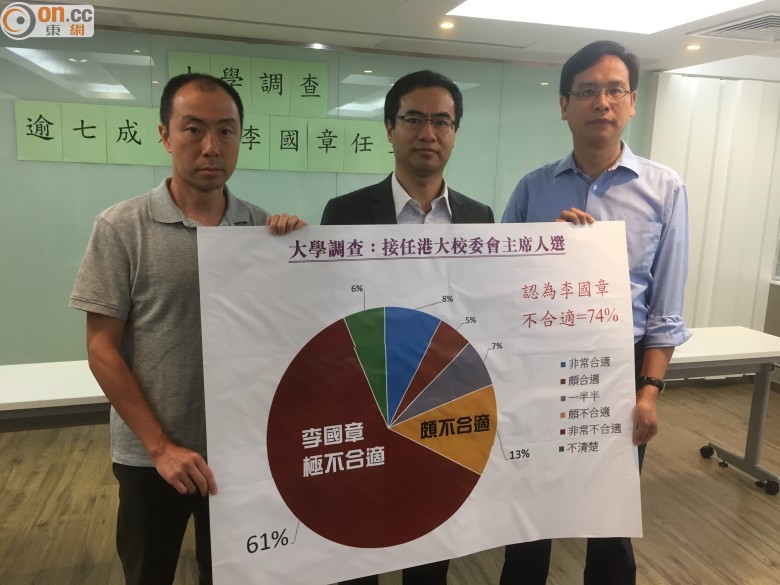
Internet comments:
- Well, there are eight universities in Hong
Kong and some (but not all) of the academic staff are Professional Teachers'
Union members. 670 PTU members responded, but if you divide this by 8, this
works out to be 84 per university. We all know that outsiders must not be
allowed to interfere with the internal affairs of a university, because the
whole point is about autonomy/self-determination. Therefore, the opinions of
the PTU members from the other 7 universities must not count. This leaves 84
respondents from Hong Kong University itself. 74% of 84 is 62. Hong Kong
University has 1,170 regular academic teaching staff members. Do you think
that 62 out of 1,170 should dictate what the university must do?
- With this rigged non-representative sample,
why is it not 100% against Arthur Li? Why did 26% not oppose Arthur Li?
- Why do they bother with running an opinion
poll of their own members? I am still waiting for the Umbrella
Revolution/Occupy Central strike by all the
teachers/students at all eight universities that the Professional Teachers'
Union had called for. And also the judicial review that they promised to file
if Johannes Chan is not appointed Pro Vice Chancellor at Hong Kong University.
So far everything has been vaporware.
- Professional Teachers' Union's legislator Ip Kin-yuen has just promised to
investigate the feasibility of holding a teacher/student strike as well as
judicial review if the appointment of Arthur Li goes through. More vapor in
the air.
- But Ip Kin-yuen does not offer the ultimate weapon: mass resignation by all
teachers and mass drop-out by all students. If he issued that call, he may
be disappointed by the response.
- You're wrong because the even more ultimate weapon is mass self-immolation
by all teachers and students in front of the HKU Library plaza. Oh, what a
sight!
- Be careful about Arthur Li Kwok-cheung. On June 26/27
2004, he uttered the famous phrase: "I'll remember this. You will pay." (see Wikipedia)

(SCMP)
October 22, 2015.
Radical lawmaker Wong Yuk-man might have
earned a reputation for throwing objects at officials, but he hit the chief
executive with something else entirely yesterday, asking Leung Chun-ying:
"When will you die?" And the beleaguered leader - who was
grilled by lawmakers from across the spectrum over "unfulfilled" election
pledges - was told he could not escape the pointed inquiry at his
Legislative Council question-and-answer session. Legco president Jasper
Tsang Yok-sing decided that, since the question was political in nature,
Leung should reply. Leung sidestepped Wong's point, instead
reciting a line of poetry by Mao Zedong : "Having too many grumbles is
detrimental to health." He then wished Wong "a long life".
There was less courtesy later in the day
when Tsang addressed his decision to reject a request by his
Beijing-loyalist ally, unionist Wong Kwok-kin, to rule the question out of
order. "Neither the chief executive, I, nor the members of the public need
the Honourable Wong Kwok-kin's lectures on what can and cannot be said,"
Tsang added.
Wong Yuk-man asked about Leung's lifespan
when Tsang pressed him to get to the point of a rant in which he accused the
chief executive of "badmouthing" and "betraying" Hong Kong on visits to the
mainland. Wong asked the president not to interrupt,
reminding him "someone" had "fixed" his brother Tsang Tak-sing - who was
removed as home affairs minister in July. Tsang silently fixed his eyes on
Wong, who asked the question he said constituents had demanded he raise -
how long did Leung have left to live? Asked by the other Wong to rule out the
question, Tsang said: "It is perfectly possible for the chief executive to
respond."
(Hong
Kong Free Press) October 22, 2015.
Lawmaker Raymond Wong Yuk-man asked Chief
Executive Leung Chun-ying when he would die, during a question-and-answer
session at the Legislative Council today, saying his voters have pushed him
to ask that question for some time.
Leung then cited a line from a poem written
by Mao Zedong. ôBeware of heartbreak with grievance overfull,ö Leung said,
adding, ôI wish you a long life.ö ôReply to Mr Liu Yaziö is a poem Mao wrote
in April 1949 after Liu complained that the CPPCC meeting Mao invited him to
was poorly planned. Mao asks Liu not to complain in the poem, saying he
should take the greater interests of the country to heart. Leung said the government has been working
hard to produce results and the current economy of Hong Kong ôis not
something that can be fixed by speaking loudly.ö
LegCo
president Jasper Tsang then asked Wong to leave the chamber, saying he
stopped Leung from speaking and was breaking LegCoÆs Rules of Procedure.
Tsang paused the question-and-answer section for a few minutes to let the
security guards escort Wong out.
ôReply to Mr Liu Yaziö
I still remember our drinking tea in
Guangzhou
And your asking for verses in Chongqing as the leaves yellowed.
Back in the old capital after thirty-one years,
At the season of falling flowers I read your polished lines.
Beware of heartbreak with grievance overfull,
Range far your eye over long vistas.
Do not say the waters of Kunming Lake are too shallow,
For watching fish they are better than Fuchun River.
Videos:
(Cable TV)
http://cablenews.i-cable.com/webapps/news_video/index.php?news_id=468774
(Ming Pao Canada)
https://www.youtube.com/watch?v=hxdVBfHIm90
(RTHK)
https://www.youtube.com/watch?v=VEIU9DCdbE0
(TVB)
http://news.tvb.com/local/562875e36db28cef27000002/
Internet comments:
- When I grow up, I want to be Legislative
Councilor. The job pays $93,000 per month, with an expense allowance equal
to that. The work is easy: you show up every day, you shout some slogans and
throw an object that misses everything, you get tossed out and you are done
for the day. Nice job, if you can get it.
- And you also get television time.
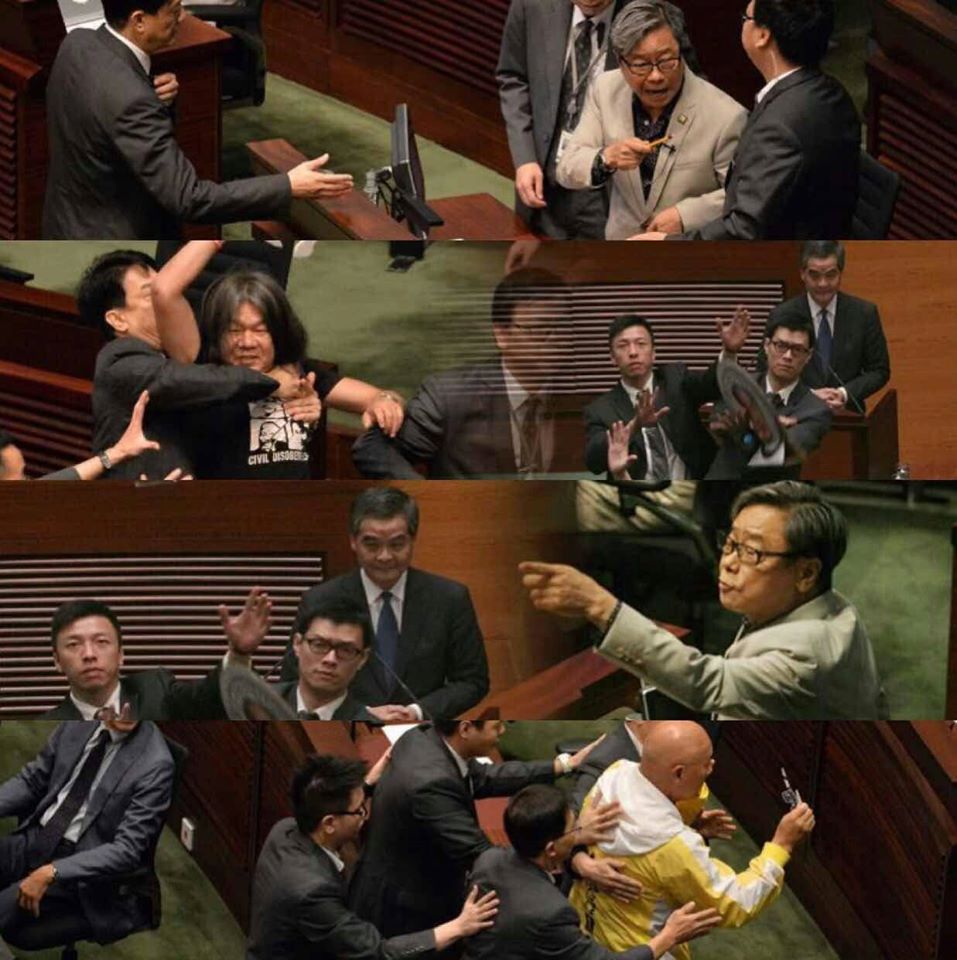
- LegCo president Jasper Tsang explained
that he said that this Q&A session is just a political dialogue and
therefore he does not need to render judgments as during normal LegCo
inquiry sessions. Tsang believed that Leung was perfectly capable of dealing
with Raymond Wong's question. Rather than spend time on considering the
issue, it was far better to let Leung answer.
But Raymond Wong's question is not a real
question. It was an insult. You don't know when you will die. Even when the
doctor tells you that you have terminal cancer and you have two weeks left
to live, the length of the period is only his educated guess. You do know
exactly when you will die if you plan on killing yourself (e.g. jumping off
the cliff at midnight). Wong's question is an oblique way of saying that
many of his constituents want to see CY Leung dead. Wong's non-question
should have been disallowed and deplored.
Jasper Tsang served as a school principal
for a number of years. But his words today are not fit for children
listening. If the students follow this example, they may go to to the
teacher and ask, "When will you die?" If the teacher gets angry, the
students will retort: "But Jasper Tsang says it's okay to ask and you as a
teacher are perfectly capable of dealing with my question."
- (Speakout
HK @ YouTube) Raymond Wong also asked: "Why does he always say bad
things about Hong Kong whenever he goes to mainland China?" I ask: "Why does
Raymond Wong never complain whenever Joshua Wong says bad things about Hong
Kong whenever he goes to the United States or Europe (see
#348)?"
- SCMP cartoon
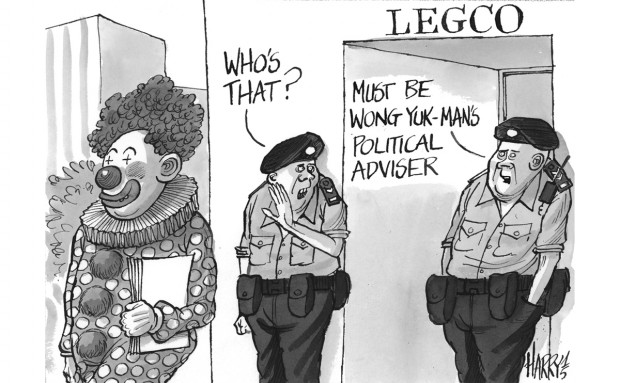
- Previously CY Leung has insistently
denied that he is a member of the Communist Party. By being able to quote
Chairman Mao's poem instantaneously, he has finally provided definitive
proof that he is a member of the Communist Party. Who else but a Communist
Party member can quote Chairman Mao off the cuff?
(Oriental
Daily) October 21, 2015.
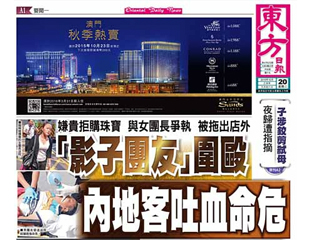
A mainland tourist walked around a jewelry
shop and decided not to buy because the prices were too expensive. He was
dragged out of the shop by some unidentified men and beaten up. He is now in
critical condition.
54-year-old male named Miao from Heilongjiang province and his female
colleague 53-year-old named Zhang came to Hong Kong on a 3-days/2-nights
package tour. The tour group of more than 20 persons started from Shenzhen
and arrived in Hong Kong the day before yesterday. The female mainland tour
guide 32-year-old named Deng led the team with a two-way Hong Kong visa.
At around 10am, the group including Miao and
Zhang came to a jewelry store in Man Lok Street, Hung Hom district. Miao and
Zhang did not buy anything because the prices were too high and the
discounts were too small. They went instead to smoke by the shop entrance.
Deng reproached them, and began to tussle with Zhang. In the chaos, Deng was
slapped in the face. Miao went up to intercede and it became a three-person
brawl. Soon a number of Hong Kong and mainland men joined in, as Miao and
and Zhang were violently dragged outside the shop. According to witnesses,
the men punched and picked Miao, who became unconscious. "Someone continued
to kick his stomach even after he was down on the ground." Finally, Miao
passed out near a lamppost. One male attacker fled in the direction of Fat
Kwong Street. Zhang was crying and screaming for help. When the police
arrived, the men had dispersed. Miao, Zhang and Deng were sent to the
hospital for treatment.
The police checked the surveillance videos, and saw many individuals
fighting from inside to outside the shop. They arrested Miao, Zhang and Tang
for fighting in a public place.
(Global
Times) October 21, 2015.
A Chinese mainland tourist
allegedly beaten unconscious by four men died at a Hong Kong's hospital on
Tuesday, with police treating the case as manslaughter and violence in public,
the Xinhua News Agency reported.
The fighting allegedly took place outside a
jewelry store in Man Lok Street, Hung Hom on Monday, where the victim, a
54-year-old tourist surnamed Miao from Heilongjiang Province, was attacked.
Miao was trying to meditate a dispute between a fellow tourist surnamed
Zhang and the tour guide surnamed Deng. The incident was allegedly sparked
by Zhang's refusal to buy expensive jewelry, which later turned into a fist
fight, news site thepaper.cn reported on Tuesday. Both Zhang and Miao were
dragged out of the jewelry shop by four unidentified men, with Miao beaten
unconscious and Zhang suffering multiple injuries. The suspects fled before
police arrived. Miao, Deng and Zhang were later sent to Queen Elizabeth
Hospital, the South China Morning Post reported on Tuesday.
Police arrested four people, including Zhang and Deng, for fighting in a
public place and wounding others, Xinhua reported on Tuesday.
Analysts said they believe that the incident
was triggered by "forced shopping," thepaper.cn said. However, the dispute
may have been caused by their smoking in the jewelry store, according to
local newspaper the Sing Tao Daily.
(Oriental
Daily with video) October 22, 2015.
Yesterday morning at around 9am,
the police came back to the scene of the incident and closed a section of the
road to traffic. At around 11pm, the 44-year-old Hong Kong tour group guide
named Wu was escorted to the scene. He wore a black hood to cover his face.
First he described the incident to the police. Then they entered the jewelry
shop. About 10 minutes later, they came back out and a dummy was used to
re-enact the incident. The suspect named Wu illustrated using his knee to hit
the right leg and lower torso of the dummy. After the dummy fell down on the
ground, the suspect showed using the hands to hold him down. The dummy laid
there with its right foot touching the bent left foot and the hands crossed in
front of the chest.
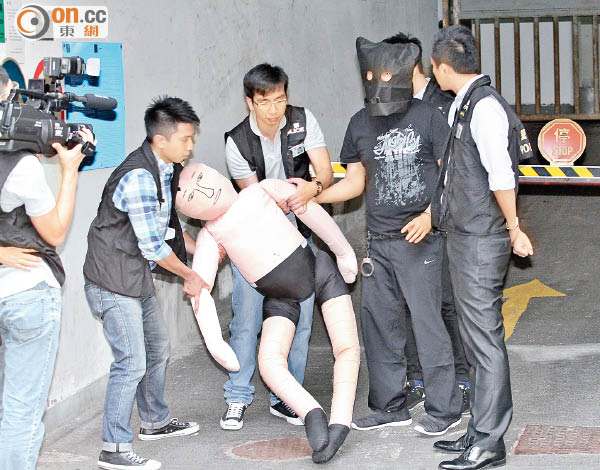
(The
Standard) October 22, 2015.
The mainland tourist
who died in a row over forced purchases was kneed several times, it has
emerged.
Police, meanwhile, suspect that two tourist
guides wanted in connection with the death may have already fled to the
mainland.
Heilongjiang tourist Miao Chunqi, 54, died
in hospital a day after he tried to stop a scuffle between mainland tour
guide Deng Haiyan and female tourist Zhang Lixia, who was accused of not
shopping. Miao was allegedly dragged
out of the jewelry shop on Man Lok Street, Hung Hom, and assaulted by four
people at the entrance to a parking lot on Monday. He died in Queen
Elizabeth Hospital the following day.
A suspect, Hong Kong tour guide Wu Yin-nam,
44, was taken to the jewelry store yesterday and demonstrated how he
allegedly attacked Miao by striking a dummy several times with his knee in
the area of the thigh. The dummy was then placed on a road with its hands
and legs crossed, indicating the victim had collapsed before being taken to
hospital.
Four people have so far been arrested,
including Deng and Zhang for fighting in a public place. The other two are
Wu and a mainland guide Liu Yang, 32.
The case was reclassified as manslaughter
and fighting in public. Police have charged Liu and Wu with manslaughter.
Both men will appear at Kowloon City Magistrates' Courts today.
Deng and Zhang, both arrested for fighting
in a public place, were released on bail pending further inquiries and told
to report back by the end of the month.
There was speculation Miao may have fainted
due to an illness, but his wife said he was "very healthy."
Miao worked for a public works engineering
company in Harbin and had been a supervisor in Hainan over the past year,
she said. Zhang was a colleague in Hainan and they joined the tour in
Shenzhen.
Miao's wife, daughter and son-in-law flew
to Shenzhen yesterday and they later arrived in Hong Kong accompanied by
Travel Industry Council executive director Joseph Tung Yao-chung. The
council has arranged a meeting between relatives and police today.
China National Tourism Administration said
Tuesday it is "highly concerned" and asked the government to look into the
incident as soon as possible.
It is understood that six mainland visitors
have complained to the Shenzhen tourism authorities about Wu forcing them to
shop during a "shopping- free" tour in September.
(EJinsight)
October 22, 2015.
The
widow of a mainland tourist who died after being beaten unconscious outside
a jewelry shop in To Kwa Wan dismissed speculation that her husband was
suffering from some illness prior to the attack. The victim, 53-year-old
Miao Chunqi, was beaten after trying to mediate in a quarrel between a
female mainland tourist and a tour guide who berated her for not making any
purchase at the jewelry shop. MiaoÆs
wife, surnamed Zhang, insisted in an interview with a mainland newspaper
that her husbandÆs health condition was normal before he left for Hong Kong.
Zhang and seven other members of MiaoÆs family arrived in Hong Kong on
Wednesday night from Heilongjiang to identify the body.
Travel
Industry Council (TIC) executive director Joseph Tung Yiu-chung, who
received the group, said the family members were tired and devastated. The
TIC is providing assistance to the family during their stay in the city.
Meanwhile, two tour guides suspected of involvement in the incident,
including a 44-year-old Hong Kong citizen, were set to appear before the
Kowloon City MagistratesÆ Court on Thursday to face manslaughter charges,
Ming Pao Daily reported. The local suspect was taken back to the jewelry
shop for a reconstruction of the incident.
The
China National Tourism Administration has released a statement expressing
deep concern over the mainland touristÆs death. Meanwhile, mainland
newspaper Global Times published an editorial on Wednesday condemning the
incident, saying that it will ruin Hong KongÆs image as a tourist
destination among mainlanders.
The article said mainland tourists are being ripped off every day and the
situation has reached a tipping point.
Leung Fong-yuen, chairwoman of the
Hong Kong Tourism Industry Employees General Union, said the industry has
become aware of so-called ôshadow touristsö ù around two or three persons in
each tour group ù who have been hired by travel agencies to
persuade tourists to spend.
Leung
said a mainland ordinance enacted in 2013 against tour operators who charge
very low fees but force tourists to spend in designated shops is only being
enforced among major travel agencies as authorities do not have the manpower
to supervise smaller agencies.
Meanwhile, police arrested two women, aged 32 and 53, who were involved in
the jewelry shop incident for fighting in a public place. The two were
released on bail and due to report to the police by end of the month.
(SCMP)
October 22, 2015.
Two of the four men who allegedly attacked
and killed a mainland tourist at a jewellery shop in Hung Hom on Monday may
have fled across the border, police sources say. Detectives believe the
fugitive pair who helped drag 54-year-old Miao Chunqi out of the store
before beating him unconscious could be tour group leaders from the
mainland.
Hours after the attack, police arrested two
other men - one of them from Hong Kong and the other a tour group leader
from the mainland. Miao died in Queen Elizabeth Hospital, Yau Ma Tei, on
Tuesday. The two arrested men - aged 32 and 44 -
were jointly charged with manslaughter yesterday and will appear in Kowloon
City Court today. Police also arrested two women, aged 32 and 53, for
fighting in a public place. They have been released on bail pending further
inquiries.
Yesterday officers took one of the male
suspects - hooded, chained and wearing a black T-shirt and trousers - back
to the scene in Man Lok Street, where a blow-up dummy was used to film a
reconstruction of events. During a bizarre 30-minute episode, the
suspect, who was held on a metal chain leash by a plain-clothes officer, was
asked to kick the dummy "victim" while it was held by officers at the
entrance to a car park.
Miao and a female colleague, Zhang Lixia,
53, were among a group of 19 mainland tourists who arrived from Shenzhen on
Sunday. He was allegedly attacked after intervening in a dispute between
Zhang and the woman leader of their tour group inside the shop. His death prompted a rare call from the
nation's tourism authority for Hong Kong to protect the rights of mainland
travellers.
Several mainland media outlets covered the
death of the tourist, rekindling anti-Hong Kong sentiment online. Global
Times, a state-run Beijing-based conservative daily, said the tragedy had
reminded many mainlanders about previous anti-mainland behaviour by extreme
forces and would "further damage Hong Kong's image in mainlanders' minds". The newspaper said while details of the
tragedy - such as whether the beating was led by a mainland gang - remained
unclear, the death reflected a "chaotic Hong Kong tourism market and a
serious loophole in the rule of law". It noted that following the
pro-democracy Occupy movement and anti-parallel trading campaigns, many
mainlanders had opted to travel to other Asian destinations instead of
"helping maintain Hong Kong's economic prosperity".
(SCMP)
October 22, 2015.
A Shenzhen tour escort accused of killing a
mainland Chinese tourist during a dispute at a Hong Kong jewellery shop did
not hit the victim, a court heard today. Tour escort Liu Yang, 32, and Hong Kong
tour guide Ricky Woo Yin-nam, 44, appeared before Kowloon City Court jointly
charged with manslaughter for the killing of Miao Chunqi, 54, on Monday
outside D2 Jewellery in Hung Hom. No plea was made.
The prosecution said Liu acknowledged he
had dragged the victim out of the shop but ôdenied hitting anyoneö. Woo,
meanwhile, told police officers under caution he had grabbed and kicked the
deceased, the prosecution said. The prosecution pointed out that CCTV
footage showed several assailants punched the victim after dragging him out
of the shop. ôOne or two more persons involvedö are still wanted, the
prosecution said.
While Liu did not apply for bail, WooÆs
bail request was denied, as Principal Magistrate Peter Law Tak-chuen pointed
to his potential grounds for absconding, the serious nature of the
allegation against him, and the fact other suspects were still at large.
(SCMP)
October 24, 2015.
A mainland tourist who died 24 hours after
he was allegedly beaten up when a jewellery shopping trip turned violent may
have been killed by a heart attack, the South China Morning Post has
discovered. Following a postmortem examination yesterday, a source with
knowledge of the investigation into the death of 54-year-old Miao Chunqi
said: "Initial findings suggest a heart attack, but we have to wait for the
results of a toxicology examination to come to a conclusion on the cause of
death."
Separately, police last night arrested
42-year-old Lam Tuen-hung, boss of the local travel agency that hosted Miao
and his tour group from Shenzhen. The agency, Tian Ma International (Hong
Kong) Travel, is under investigation after the Hong Kong Travel Industry
Council complained to police that it had used forged documents.
The council's executive director, Joseph
Tung Yao-chung, said information that Tian Ma submitted about the tour group
might have contained a false declaration. According to the document, a
mainland-registered agency was responsible for organising the tour group in
Shenzhen, Tung said. However, the mainland agency had told Shenzhen's
tourism authorities it did not organise the tour, he added. "Because of
suspected forged information, we lodged a complaint to the police," Tung
said.
Companies Registry documents show the firm
was set up on September 14, 2012. Lam is also sole director of Flying Horse
International Travel Holdings, which was incorporated on September 8 this
year. Both agencies have addresses on the third floor of Hang Fung
Industrial Building in Hok Yuen Street, Hung Hom. Neither responded to
requests for comment.
Videos:
(Compilation of news reports)
https://www.youtube.com/watch?v=O8CaSdmnuBM
Internet comments:
- While it is for certain that a
male mainland tourist was critically injured near a jewelry store in Hung Hom,
there were many different versions about what happened:
- The man named Miao was smoking
inside the shop, refused to stop when asked and got into a fight with the
sales assistants.
- The
man named Miao refused to buy the overpriced fake jewelry, and this upset
the female Hong Kong tourist guide named Deng who lives off the sales commission. Miao and Deng got into a fight, and other Hongkongers came to the help of
Deng.
- The woman
named Zhang refused to buy the overpriced fake jewelry, and this upset the
female tourist guide named Deng who lives off the sales commission. Zhang and Deng
got into a fight. Miao tried to stop the fight, but he became the target
instead.
- Miao and
Zhang refused to buy anything. This upset the "shadow" tourist in the
group. This person works for the tour company but assumes the identity of
a tourist in order to egg other tourists in the group on to make purchases. Miao
fought with this unknown "shadow". There were several other groups led by the
same company, and their "shadow" tourists joined to attack Miao.
When a single incident has so
many versions, it is best to shut up and wait for a more authoritative account
(such as one based upon the surveillance videos).
- (Bastille
Post) October 20, 2015.
Tencent placed this new story on
the front page. Look at the number of comments
- Chongqing rich man picks up garbage for 8 months, 1524 comments
- Tourist believed to be beaten to death in Hong Kong for refusing to make
purchases, 58000 comments
- How remorseless travel agencies create shame for the Pearl of the Orient,
263 comments
- New Canadian premier said to be supported by Cheng Mu-yang, 125 comments
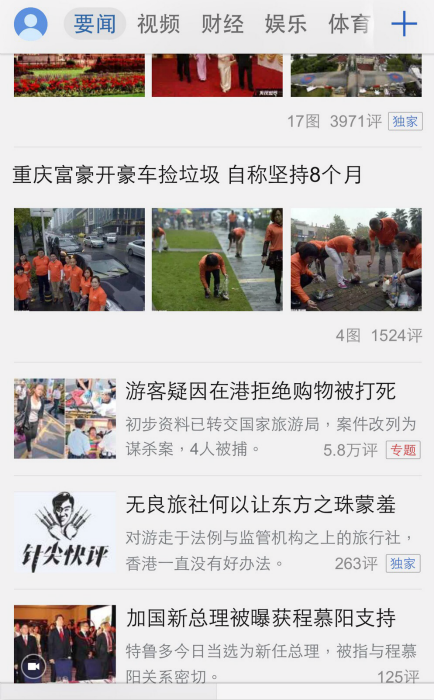
The number of comments for this story is a
lot higher than those for other stories.
Tencent also ran an online poll.
Q1. Have you ever been forced to make
purchases in Hong Kong?
45%: Yes, and I was scared
27%: No, I went to proper stores
27%: Hard to say
Q2.
What do you think about the current conditions for shopping and touristing
in Hon gKong?
9%: Okay, better than mainland
72%: Worse, the conditions have worsened
17%: Hard to say
Q3.
Do you want to go shopping/touristing in Hong Kong soon?
8%: Yes, because forced purchasing is rare
53%: I don't want to go to Hong Kong to shop/tour any more
37%: I have to consider carefully
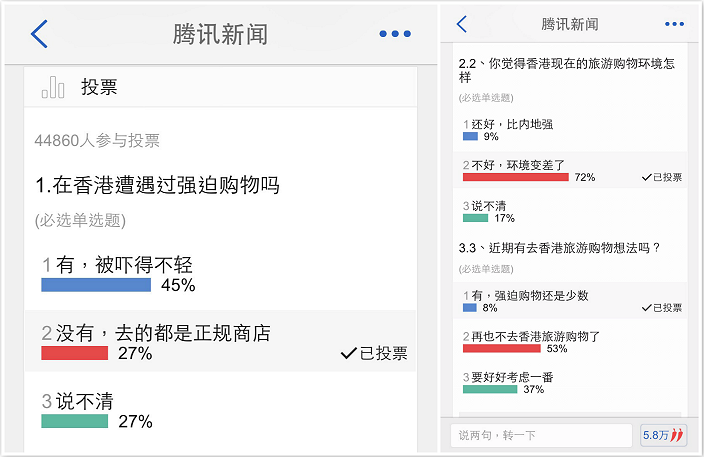
- (HKG
Pao) Does reading Apple Daily make you a cold-hearted monster?
Sample comments:
- I am waiting for the second
case, the third case ... to take place!
- Also it would be nice if those mainland
students wouldn't come!
- If they come again, they will have no
children and no grandchildren.
- Go to hell, Chinaman! Go to hell,
Chinaman! Go to hell, Chinaman! Go to hell, Chinaman!
- Oh! I die like this way ... I was
looking for some small benefits, but I lost my life. Was this worth it?
But Hong Kong is no longer what it was before the handover. Your life is
not protected when you come here on a tour trip. You should think
carefully before you come here!
- You should go back to China!
- I shouldn't be elated when someone dies,
but I was super-happy when I read "Boycott Hong Kong"!
- A mainland tourist used his own death to
warn compatriots not to come and spend money in Hong Kong.
- If you don't want to spend money, you
shouldn't come to Hong Kong. You deserve this!
- The guy should have stayed home and
shopped through Taopao.
- 300,000 Chinese people were massacred in
Nanjing, but the Chinese continue to flock to Japan to shop. So what is
the big deal about one death in Hong Kong.
(Independent)
October 20, 2015.
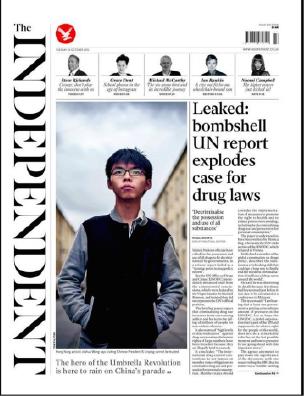
The teenager who became the public face of
the Hong Kong protest movement has called on David Cameron to ôpublicly
challengeö the visiting Chinese President over a crackdown on human rights
in the former British colony. Joshua Wong, 19, who faces up to five years
in jail for his role spearheading the Umbrella Revolution, named after the
parasols used by protestors to defend themselves from police tear gas, said
the Prime Minister ôcould not trustö Chinese assurances on human rights made
during this weekÆs state visit by President Xi Jinping. Protestors in Hong Kong captured the
worldÆs attention last year when they occupied busy intersections for 79
days and tried to storm the government headquarters. They were calling for
universal suffrage, a right promised to the city under a deal between China
and Britain before the former colony was handed back to Beijing in 1997.
In an interview with the Independent, as he
arrived in the UK for a university speaking tour to coincide with the first
state visit by a Chinese leader in 10 years, the teenager condemned Britain
for failing to pressure Beijing over crackdowns in Hong Kong and on the
Chinese mainland. ôMy message to David Cameron is that China
has not kept its promise to the people of Hong Kong to deliver universal
suffrage, so how can you trust President Xi to keep his word on the trade
deals signed this week? You cannot. The Chinese government will not keep its
promises on trade or on human rights,ö he said.
President XiÆs government in Beijing has
been accused of increasing interference with the rule of law in Hong Kong,
alongside crackdown on dissent on the mainland. In July it enacted a new
State Security Law which stipulates new ôresponsibilitiesö for the people of
Hong Kong to protect national security, a move which prompted dismay among
democracy campaigners and NGOs.
Mr Wong, who appeared on the cover of Time
magazine last year with the headline: ôThe Face of the Protestsö, faces
trial next week on charges of ôunlawful assemblyö and incitement for his
role in an attempted storming of the government headquarters in Hong Kong. The teenager said he intended to continue
the ôstruggle for democracyö but said that Britain had not ôput enough
effortö into moves to monitor democracy and human rights in Hong Kong.
ôAfter the Umbrella protests we knew the
British government had failed to keep its promise on democracy and that it
viewed trade with China as more important. Despite this we are still
determined to continue our fight for universal suffrage and autonomy,ö said
Mr Wong, who is hoping to stand for election next year. ôThe UK government
must put human rights on a higher status than trade with China.ö
Maya Wang, a China researcher at
international watchdog Human Rights Watch, said the NGO was ôincreasingly
concernedö that the British government had ôcapitulatedö over the
deteriorating human rights situation in Hong King and on-going, more serious
concerns in mainland China. She said: ôThe government of Hong Kong is
clearly going after the protest leaders and we call on David Cameron to use
President XiÆs state visit as an opportunity to raise this concern. The UK
has a moral obligation to pressure Beijing over Hong Kong.ö
Mr Wong was due to address the Oxford Union
last night as President Xi arrived at Heathrow to embark on a much-heralded
four-day state visit, which will see him stay at Buckingham Palace, received
all the pomp and ceremony the British Royalty can offer and meet with
Chinese investors in the London and Manchester. However human rights campaigner are
concerned about allegations over the increasing use of torture on the
Chinese mainland, the detention of human rights lawyers in ôblack sitesö and
repression of ethnic minorities.
Despite this, the UK is rolling out the red
carpet for President Xi. Last night giant red flags of the PeopleÆs Republic
of China were already lining the Mall alongside the Union flag, while the
president and his wife will today receive a Royal welcome on Horse Guards
Parade As the Chinese president places his foot
upon the first steps of the Royal Pavilion a 41 gun ôRoyal saluteö will ring
out from Green Park, added to by 62 guns at the Tower of London. President
Xi will then attend a state banquet where he will meet the Queen, Labour
leader Jeremy Corbyn and hold talks with David Cameron.
Meanwhile, Amnesty International and Free
Tibet will protest in St JamesÆs Park over human rights violations and the
detention of up to 30 prominent human rights lawyers. Demonstrators will
hold banners reading ôRights over revenueö and ôPeople before profitö, while
a Free Tibet ôadvanö carrying the Tibetan flag, which is banned in China,
will follow him during his stay in London.
(Hong
Kong Free Press) October 21, 2015.
Hong Kong student activist
Joshua Wong has been invited to the UK to give speeches at six universities.
His visit coincides with President Xi JinpingÆs state visit. Speaking to HKFP
from London on Tuesday, Wong talked about the human rights protests in London,
his speeches at Oxford University as well as why he often seemed to appear in
the same place during XiÆs state visits.
HKFP: Last
time when President Xi Jinping visited the US, you were in the US to attend
events. This time Xi is visiting the UK and youÆre giving speeches at
British universities, was this a coincidence or did you do it on purpose?
Wong: Woah
woah woah, this has nothing to do with me! Firstly, last time I was in the
US to celebrate the 75th anniversary of the founding of the
Freedom House. I couldnÆt decide when the Freedom House was founded, could
I? It was before I was born, right? So I went to the US in the same week as
Xi.
As for this week, Oxford Union, i.e. Oxford
UniversityÆs student union, confirmed the date of visit with me as October
19 or 20 three months ago. The dates of XiÆs UK visit were not announced
until a month ago, so I decided to go to the UK before Xi did. If you say I
did it on purpose, it really wasnÆt me. It was a coincidence. I wouldnÆt
intentionally try to avoid it, to say wherever Xi goes I cannot go. But both
times we clashed [the visits].
HKFP: Some
media reports said you are being ôusedö by foreign anti-China forces to
ôfollow and attackö Xi with protests, how would you respond to that?
Wong: How
can I ôfollow and attackö Xi? I didnÆt even think of getting close to him.
Actually, this time, the purpose of my British visit is to give speeches
at six universities. In four days I have to go to six universities and do
interviews with a dozen media outletsà For me I definitely havenÆt been
used, and I donÆt intend to ôfollow and attackö Xi, he is not someone who I
can just follow if I want to.
HKFP: How
did your speech go at Oxford University and other places? Did you see any
protests against you?
Wong: At Oxford,
the debate hall was full, nearly 500 people. Now I am on my way to visit the
third university. I havenÆt seen any protests against me yet. The response
of the audience was very positive, because Hong Kong is an issue in Britain.
A past colony û of course many people are interested to hear about it.
WhatÆs more, China is a economic and trade partner of Britain. ChinaÆs human
rights situation, especially Hong KongÆs situation û as Hong Kong is already
the place with the most human rights in China û how Hong Kong develops will
receive a lot of attention.
HKFP: In
a recent
interview with AFP, you said that the UK government has been blinded by
XiÆs trade deals and has ignored human rights issues. In your opinion, which
human rights issue should British Prime Minister David Cameron bring up with
Xi?
Wong: I
think Cameron has a responsibility. Actually, Britain signed the
Sino-British Joint Declaration, but China has long violated its promises in
the Declaration by suppressing Hong KongÆs human rights, democracy and
freedom.
The British government, as a signatory of
the Declaration, no doubt has the responsibility to follow up on how the
Declaration is being implemented in Hong Kong, and to ask Xi Jinping why he
still wonÆt give Hong Kong a democratic system.
HKFP: How
useful would such a conversation be in helping to change the
situation in Hong Kong?
Wong: I
should say, we cannot expect the sky will change in Hong Kong as soon as
Cameron says something, or that China will change as soon as Xi responds to
Cameron. This is impossible. But, at least, Britain needs to fulfill its
responsibilities as a signatory of the Sino-British Joint Declaration.
Also, Britain is a country that loves
democracy and freedom, if it doesnÆt talk about [democracy and freedom],
what does it want to do?
HKFP: Can you describe the
protests in London? Were they supported by a lot of people, or did people
generally welcome Xi?
Wong: I
saw many pro-China people here waving their little flags, they outnumbered
the protesters. I think this situation is very ironic because inside China,
many people are unhappy with the government. Many fighters of human rights,
democracy and freedom have been arrested, and now even human rights lawyers
have been arrested. I think today what I saw in London is the opposite of
the situation in the mainland.
HKFP: You
filed a
judicial review earlier to challenge the minimum age a person can run
for the Hong Kong legislature. You said you wanted to lower it from 21 to 18
and wanted to run. If you are elected, how would you fight for democracy
inside the legislature?
Wong: I
think at least what needs to change is the state of our fight [for
democracy] inside the legislature, which now has become expendable. But the
situation is that my chances of winning the judicial review are not high
because the government will appeal [if I win]. Right now, I havenÆt even got
the courtÆs permission to proceed with the case, itÆs too early to talk
about anything.
HKFP: When
we spoke to your colleague
Agnes Chow, she said Scholarism and other groups were exploring the
possibilities of building a civil referendum system for people to vote on
issues they care about. Any referendum system organised by the pan-democrat
side is likely to be boycotted by pro-government supporters, so how would
the referendum results truly reflect the opinion of society?
Wong: I
think referendums are a show of attitude for all people, just like last
yearÆs June 22 referendum. Certainly, it had a political mobilisation
effect. Its influence is bigger than its purpose in reality. Also, if the
result of referendums can be linked to some lawmakersÆ votes inside the
legislature, it could encourage more people to take part in the referendums.
But now is not the right time to build the referendum system yet, because
itÆs still being debated.
(EJinsight)
October 22, 2015.
The
world is focusing on President Xi JinpingÆs state visit to Britain this
week. The
British monarchy and government have rolled out the reddest of red carpets
for Xi and his wife, Peng Liyuan, reflecting the significance of the
Sino-British relationship ù and the 30 billion pounds (US$46.3 billion) in
contracts he has brought with him.
Government officials from Prime Minister
David Cameron on down are making no secret of their hope that China will
play a growing role in supporting the development of BritainÆs economy. Yet
some of XiÆs hosts did not hesitate to hint at their misgivings about his
countryÆs poor human rights record. These signals indicate that China is
still lacking in the soft power needed to emerge as a great country, rather
than just an economically strong one. BritainÆs truly free press reflects
how the public at large is treating XiÆs visit.
Beijing officials, accustomed to a fawning
media, would have expected the British press to run a series of glowing
stories on the presidential visit, focusing on the building of a
Sino-British golden era. But those officials would have been shocked
on Tuesday, XiÆs first full day in Britain, when The Independent, one of the
countryÆs ôquality papersö, published a front-page story on Hong Kong
student leader Joshua Wong Chi-fung urging Cameron to ôpublicly challengeö
Xi over a crackdown on human rights in the former British colony.
The newspaper, owned by a Russian tycoon,
lived up to its name with its own take on XiÆs state visit, headlining its
story ôThe hero of the Umbrella Revolution is here to rain on ChinaÆs
paradeö. It quoted Wong, the founder of the student group Scholarism, as
saying China has not kept its promise to the people of Hong Kong to deliver
universal suffrage. He also condemned the British government for failing to
keep its own promise on democracy in Hong Kong (by ensuring its development
as provided in the Sino-British Declaration of 1984) and said it views trade
with China as ômore importantö.
In a speech welcoming Xi, Queen Elizabeth
seemed to understand that the people of Hong Kong are concerned about the
increasing intervention of Beijing into their cityÆs internal affairs. She
praised the ôvisionary conceptö of ôone country, two systemsö that the late
Chinese leader Deng Xiaoping introduced.
Pundits interpret the QueenÆs reference to
DengÆs policy as an indirect reminder to Beijing that it should maintain the
unique status of Hong Kong for the full 50 years during which the policy was
intended to apply.
At one
of the most important events on the visiting presidentÆs itinerary, a speech
to both houses of Parliament, John Bercow, the Speaker of the House of
Commons, pointedly praised Nobel peace laureate Aung San Suu Kyi, another of
ParliamentÆs recent guests, as a ôchampion of democracyö before inviting Xi
to address the assembly.
Observers interpreted that as a reminder to
China of its own Nobel peace laureate, the dissident Liu Xiaobo, who
languishes in prison. Several human rights advocacy groups, including
Amnesty International, protested in London as Xi arrived. They urged the
British government to monitor the treatment by Beijing authorities of
dissidents such as Liu and to work toward freedom for the people in mainland
China.
For the first two days of XiÆs visit, most
British newspapers didnÆt treat it as important news.
On
Wednesday, three newspapers did put the presidential visit on the front
page, but two of them focused in their stories on Prince WilliamÆs wife,
Kate, the Duchess of Cambridge, wearing the Queen MotherÆs lotus flower
tiara at the state banquet welcoming Xi. The Guardian published a story
about steelworkers who lost their jobs when several steel plants shut down
this week urging Cameron to ôput demands on the tableö to stop cheap imports
of Chinese steel killing the British industry.
Meanwhile, Londoners saw for themselves how
mainland China puts on a welcome for visiting leaders. Tens of thousands of
Chinese occupied the best positions along The Mall in London when Xi
arrived. They were dressed in red and waving red flags and holding red
banners that said ôWelcome President Xiö ù which were reportedly provided by
the Chinese Embassy. One of the main functions of the red crowd
appeared to be to block protest groups from being seen by Xi as he passed
by. Some Londoners noticed that the welcoming team tossed their red flags in
nearby trashcans once he was gone.
China has become one of the worldÆs most
influential countries because of its economic strength, for which it is
deservedly respected. But how deep does this respect go? The leaders in Beijing may think they can
buy a grand reception in places hungry for Chinese investment, like Britain.
But as long as the Communist Party fails to accord the Chinese people the
dignity and respect all people want and deserve, China has still a long way
to go to be seen as a great nation.
(SCMP)
October 21, 2015.
Student activist Joshua Wong Chi-fung led
protesters from Hong Kong in opposing London's deepening ties with Beijing,
as he attended a human rights rally in the British capital yesterday. Wong's
attendance at the rally coincided with President Xi Jinping's first state
visit to Britain - during which British Prime Minister David Cameron hopes
to secure trade deals with Beijing worth billions of dollars.
Speaking to the South China Morning Post,
Wong attacked Beijing for breaking its promise on the 1984 Sino-British
Joint Declaration that paved the way for the 1997 handover and made
provisions for democratic elections in 2017. "Why is the UK seeking further cooperation
with the Chinese government when [Beijing] broke its promise on the Joint
Declaration?" he asked. "I worry about whether 'one country, two systems'
will result in one country, one system. The new generation is demanding the
right of self-determination because we are really afraid that [after 2047]
Hong Kong will merge with China and we will not have rule of law, separation
of power and freedom of speech." The student activist is in the country to
speak at British universities including the Oxford Union, the London School
of Economics and the School of Oriental and African Studies about
democratisation in Hong Kong.
About 300 protestors representing Hong Kong
Overseas Alliance, Amnesty International, Tibetan and Uygur groups, and
Falun Gong and Tiananmen Square groups gathered peacefully near Buckingham
Palace. Among them was blind dissident Chen Guangcheng and Tiananmen
activist Shao Jiang. Competing for space and noise, thousands of
pro-Beijing supporters lined The Mall, the road leading up to Buckingham
Palace, waving Chinese flags and banners to greet Xi. They were joined by
dragon dancers, whose loud drums helped to drown out the noise of the
protesters.
(SCMP)
Xi Jinping's UK visit shows the changing face of Sino-British relations. Alex
Lo. October 21, 2015.
The government of David Cameron has been
widely accused of kowtowing to Beijing as it rolls out the red carpet for
President Xi Jinping's visit to Britain this week.
Here's a typical example, from the
Financial Times: "Diplomats accuse Britain of 'kowtowing'". "He is running roughshod over the Foreign
Office and security policy," reported The New York Times, while
accusing his government of departing from "Western" policy.
I am not sure if these are fair criticisms.
The main objections have been over Cameron's refusal to engage China on
human rights and cybersecurity. But Xi will still be getting an earful
anyway, just not from the prime minister. A private audience has been
arranged for Jeremy Corbyn, the newly elected leader of the Labour Party, in
which Xi is expected to get more than a mouthful from the veteran British
socialist about China's human rights abuses, including the case of Liu
Xiaobo.
Meanwhile, hours before Xi's arrival on
Monday, Prince William urged Chinese citizens to stop buying illegally
traded wildlife products, such as ivory and horn, to save Africa's rhinos
and elephants. Indeed, the prince has already extracted a promise from Xi to
crack down on the illegal trade.
It's true that between Cameron and Xi,
there will be nothing else to discuss but bilateral trade and businesses.
There are about 150 deals to be sealed during the trip. Britain is now the
second-largest trading partner with China in the European Union. It used to
be the fourth. Beijing certainly appreciated Britain being the first Western
country to break ranks with Washington to join the China-led Asian
Infrastructure and Investment Bank. But, of course, other major Western
allies have followed London's example, with the exception of Japan.
In fact, it has never been Western policy,
whatever "Western" means, to make human rights a key component of a China
policy. That has only been the case with Britain and the US. Now, Britain
has simply recognised the limits of its power and is dealing with China
mainly on business, just like virtually every other Western country except
the US. Still it's clever enough to arrange
influential Brits outside the government to round on Xi. That should satisfy
those bleeding hearts from the West.
(The
Guardian) October 22, 2015.
David Cameron sought assurances from the
Chinese president, Xi Jinping, about political freedom in the former UK
colony of Hong Kong, as the week-long festival of closer Sino-British
co-operation neared its end. Cameron and the Chinese president spent the
afternoon at the prime ministerÆs country retreat, Chequers, discussing
foreign policy issues including Hong Kong and Syria, part of a visit that
the Conservative government believes has put British-Chinese relations on an
entirely new and more intimate footing. The president will end his state visit in
Manchester on Friday, with a visit to Manchester City football club and a
meeting with northern-based businessmen. Cameron was seeking assurances that the
Hong Kong government would remain semi-autonomous and entitled to choose its
own leadership without prior vetting by the Chinese government.
(Hong
Kong Free Press) October 23, 2015.
British Prime Minister David Cameron
brought up the issue of Hong KongÆs political autonomy with Chinese
President Xi Jinping during his state visit, reports the Guardian. During an
hour-long talk, Cameron sought assurances from Xi that his government will
not prescreen candidates for chief executive elections in the former British
colony, the report said. The BBC also said that Cameron had been ôexpected
to raise concerns over Hong Kong directlyö with the Chinese president, but
no official details of this have been released. The conversation happened at
Chequers Court, CameronÆs country retreat, on Thursday. Hong Kong was also
not mentioned in a joint UK-China statement issued on Thursday.
The statement said XiÆs visit, the first of
a Chinese president to the UK in a decade, ôprovides a historic opportunity
for UK-China relations.ö The two sides agreed to strengthen cooperation in
economic development, protecting intellectual properties and climate change.
Human rights was however mentioned briefly.
ôThe two sides will enhance mutual respect and understanding, and continue
exchanges on human rights and rule of law,ö the statement said. When asked about ChinaÆs human rights
conditions in a press conference on Thursday, Xi said Beijing has ôfound a
path of human rights development suited to ChinaÆs conditions.ö ôWith regard
to the protection of human rights, looking around the world we note there is
always room for improvement,ö the Chinese president said.
The British prime minister said they could
discuss business and have a conversation about human rights at the same
time. ôSo I totally reject the idea you either have a conversation about
human rights and steel, or you have a strong relationship with China. I want
both and we are delivering both and itÆs when you have that strong
relationship, with a strong partnership we have, you are able to discuss all
of these issues,ö Cameron said.
(SCMP)
October 23, 2015.
British Prime Minister David Cameron has
sought assurance from President Xi Jinping, who is on a state visit to UK,
that Hongkongers would be able to choose their own leader without BeijingÆs
prior vetting, according to a report. Cameron touched on the political
stalemate in Hong Kong for the first time during XiÆs visit amid mounting
criticism Britain had ignored ChinaÆs human rights record for trade
benefits, The Guardian reported.
The remarks also came after Hong KongÆs
legislature voted down in June a Beijing-decreed political reform package
for the 2017 chief executive election, which allowed Hongkongers to choose
their own leader only from two or three candidates approved by a
1,200-strong committee. Chief Executive Leung Chun-ying has previously said
his administration ôhas finishedö the work on reform and would concentrate
on addressing economic and livelihood issues in his remaining term.
Spending the afternoon at the prime
ministerÆs country retreat, Chequers, on Thursday, The Guardian
reported that Cameron sought assurance from Xi that Hong Kong would remain
semi-autonomous and entitled to choose its own leadership without prior
vetting by the Chinese government.
Democratic Party chairwoman Emily Lau
Wai-hing said it was "not enough" for Cameron to raise concerns over the
city's political freedom to Xi in a closed-door meeting. "He should have
raised it at a higher level occasion, such as a press conference or other
public events," Lau said. "As a signatory to the [Sino-British] Joint
Declaration, Britain has the political and moral responsibility to voice out
for Hong Kong ... not raising the matter publicly has given people an
impression the city a low priority for Britain." Lau said Beijing's earlier
white paper on "one country, two systems" and recent remarks by state
officials were all very worrying, and she hoped Cameron was not just paying
lip service but would continue to speak up for Hong Kong on other occasions,
not just Xi's state visit. Lau also held reservations on Cameron's quoted
remarks that the city should remain "semi-autonomous". "It has always been
'a high degree of autonomy' [as in the joint declaration]. I hope Cameron
would not mix that up and send a wrong signal to Chinese officials," she
added.
In its six-monthly parliamentary report on
Hong Kong published in July, the British government backed pan-democratsÆ
calls for the government to restart electoral reform to achieve universal
suffrage, saying it was imperative for the ôeffective functioning of, and
confidence inö the ôone country, two systemsö guaranteed by Beijing. The
British government had urged Hong Kong lawmakers to study the political
reform proposals, with Foreign Office minister Hugo Swire saying in March
that BeijingÆs imperfect plan represented genuine improvement as ôsomething
is better than nothingö.
Video:
BBC:
Joshua
Wong: I expected to pay the price Hong Kong internet users praised
Wong for reading a written script in a wooden manner.
Oxford Union:
Joshua
Wong - Full Address and Q&A
Internet comments:
- On one hand, there are these types of
SCMP articles:
Soccer-mad Xi Jinping more blue than red:
Was decision to visit Manchester City a deliberate snub to fierce rivals
Manchester United?
æFish and chips, pleaseÆ: Xi Jinping wants
to eat UK meal down the pub 'as man of the peopleÆ
China's President Xi Jinping to help
mainland business delegation boost ties with British firms
QueenÆs banquet for Xi Jinping: Balmoral
venison and James Bond theme song from 'The Spy Who Loved Me'
Chinese President Xi Jinping tells British
parliament countries can become a æcommunity of shared interestsÆ
China's first lady all smiles as British
scientists give her a computer-designed cape
Chinese dissident and Tibetan activists
arrested in Britain æto prevent breach of the peaceÆ during Xi JinpingÆs
visit
Nuclear deal takes China's relationship with
Britain to a 'new level', say leaders
To stem the tide of pro-China messages,
Civic Party legislator Alan Leong re-posted an Apple Daily note:
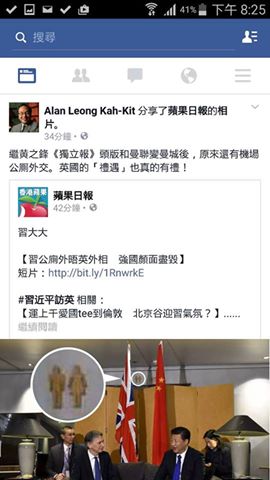
The point is that when foreign minister
Philip Hammond met with Xi Jinping, they sat outside the public toilet at
the airport. This means that Xi Jinping is being taken lightly by the
British government. "30 billion British pounds still can't buy respect! The
leader of a Great Nation is made to sit in front of a rest room on a sofa
for those waiting to use the restroom. Such diplomatic treatment is rarely
seen. The Chinese are not treated as humans -- no country in the world
treats you like a human! The 30 billion British pounds only bought you a VIP
seat!"
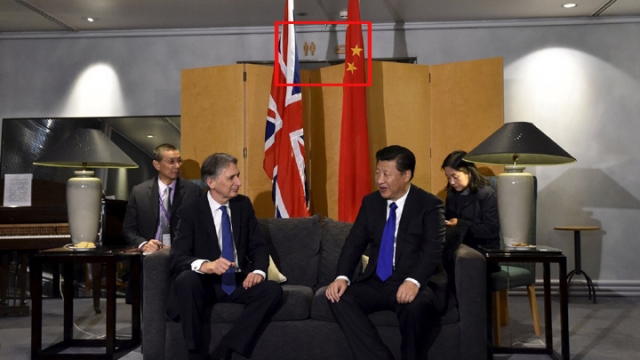
Sign of men's/women's restrooms
Video: (RT)
https://www.youtube.com/watch?v=pLm8Vaq82LE
Chip Tso: "President Xi came to London.
British foreign minister Philip Hammond built a temporary set outside the
Heathrow Airport public restroom to greet President Xi. Does Heathrow
Airport not have a VIP room? It was not enough to greet President Xi in
front of a public restroom, but he was also made to sit on the women's side.
Maybe they are hinting that the Chinese leaders is Asia the Invincible
(note: a transvestite martial arts fighter in fiction). When I see this
crappy treatment, I am shaking with anger as a Chinese person! Don't I have
money to give away? A 30 billion British pound contract! Even if you let me
sleep ten nights in the Queen's bed, that would not compensate for it!"
As it were, the location is the VIP room at
Heathrow Airport (London). Here is United States Secretary of State John
Kerry getting the same toilet treatment too. Kerry did not even get the
national flag treatment like Xi Jinping did, and he had to sit on an office
chair instead of a sofa.
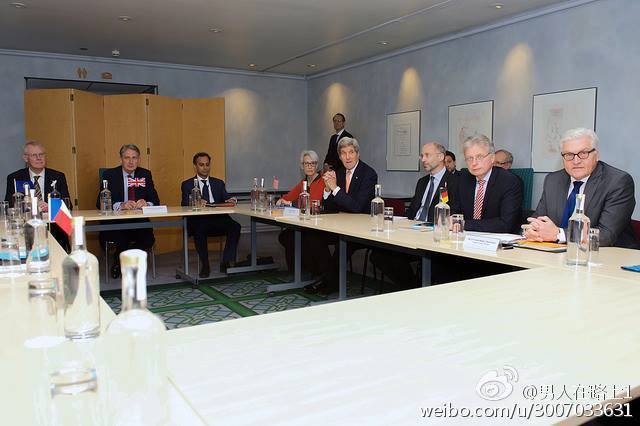
- I love to see an airport VIP lounge not
equipped with a restroom. The VIP will have to wander out into the concourse
to fight with the hoi polloi to use a stall.
- If it weren't for Apple Daily, we would have thought that Xi Jinping was
received enthusiastically by the Brits. Now that we know that the Brits
seated Xi in front of a restroom, we know that the Brits love freedom and
democracy, and will therefore support Hong Kong's return to being a British
colony.
- Well, Xi Jinping was invited to Buckingham Palace where he was free to
piss all over the place.
- If Chinese president Xi Jinping was placed on a toilet room sofa, who
loses more face? Xi Jinping or the British government?
- More likely, the British government's budget deficit caused them to rent a
room from a motel ...
- A better view of the toilet sofa:
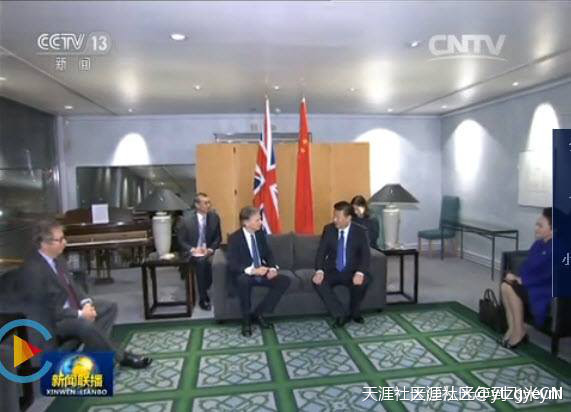
- Remember the masked Hong Kong Locliasts
who chant "Hong Kong is British" while carrying Union Jacks? How bitter must
it be now to see Queen Elizabeth II toasting Xi Jinping!
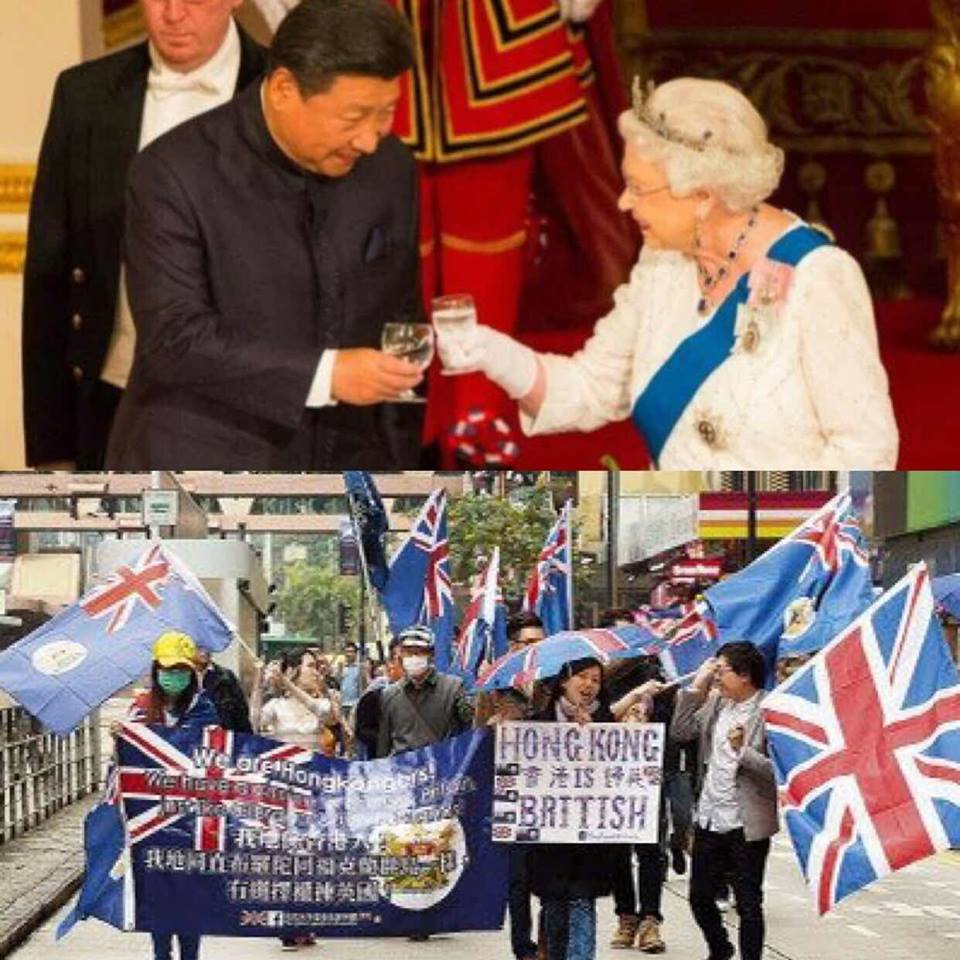
- And how about this? Does Joshua Wong have
a selfie with David Cameron?
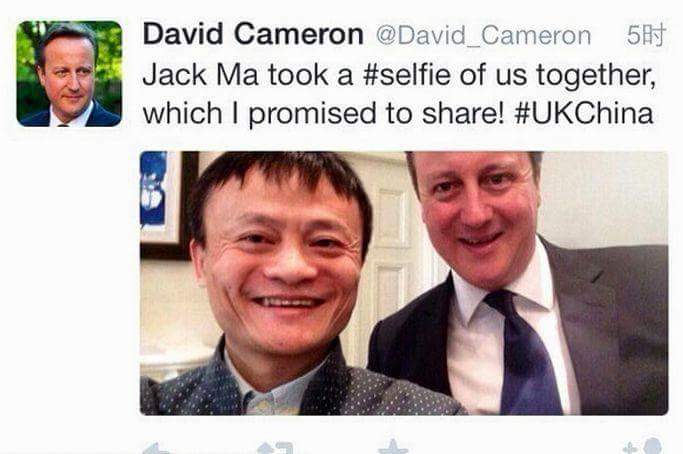
- Ko Chi-sum: More than one hundred years ago, the Zhi
Li province governor and the North Sea Minister Li Hongzhang told the
Empress Dowager: "Old Buddha, the westerners are coming to build railroads
for us." More than one hundred years later, the British prime minister David
Cameron told Queen Elizabeth II: "Your Royal Highness, the Chinese are
coming here to build nuclear power plants for us."
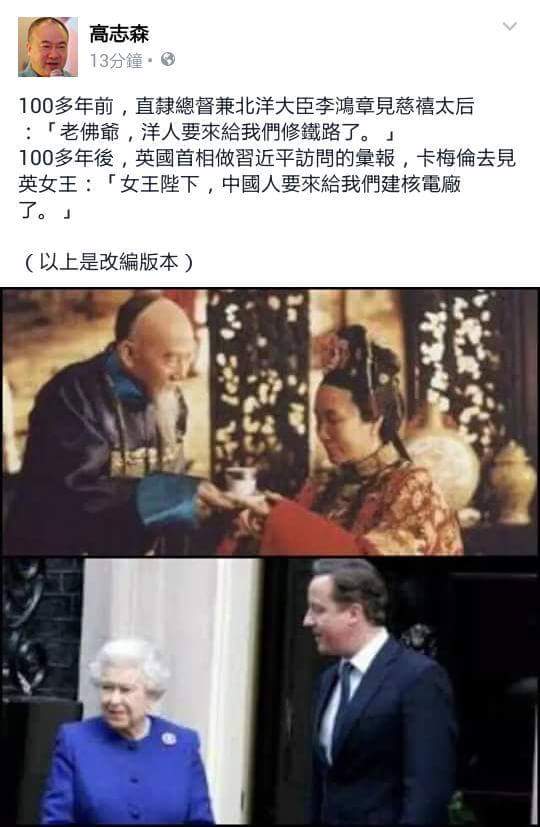
- Joshua Wong had to fly 10,000 kilometers
to the United Kingdom to protest against Xi Jinping. Why makes such a long
trip? If he wants to protest against Xi Jinping, he has to travel less than
50 kilometers from his Ap Lei Chau home to the Shenzhen border. Wouldn't
that be more direct?
- Human Rights For China?
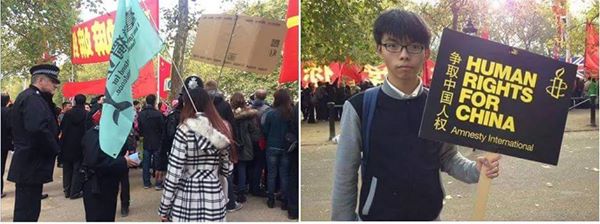
Questions to Joshua Wong about human rights for China:
Will you fight for the right of all mainland Chinese citizens to travel to
Hong Kong (which is a part of China) anytime that they want to? Or do you want
to continue to curtail such rights?
Will you fight for the right of all mainland Chinese citizens to buy as much
infant formula as they wish in Hong Kong?
Will you fight for the right of China to exercise sovereignty in Hong Kong?
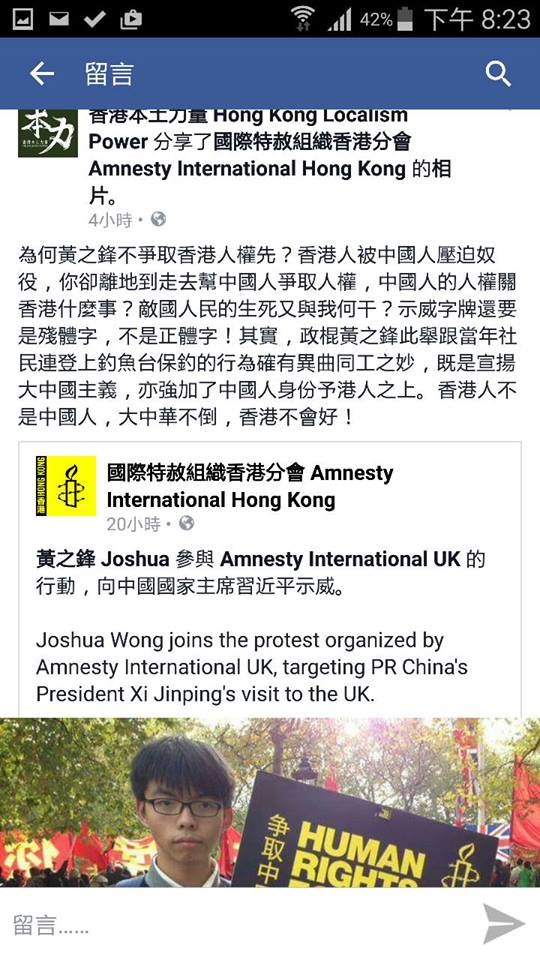
Hong Kong Localism Power: Joshua Wong, why
don't you fight for the human rights of the Hong Kong people first? The Hong
Kong people are oppressed and enslaved by the Chinese people, but you
traveled far to help the Chinese people to get human rights? What do the
rights of the Chinese people have to do with Hong Kong? What do I care about
whether the people in the enemy nation live or die? Also, the placard has
simplified Chinese characters, not traditional Chinese characters! Actually,
the political hack Joshua Wong is acting just like the League of Social
Democrats who landed on the Diaoyutai Islets before. They are promoting
Greater Chinese Nationalism and forcing Chinese identity upon the people of
Hong Kong. The people of Hong Kong are not Chinese. Hong Kong will never be
well unless Greater China falls down!
- Joshua Wong gets a spoof on his placard:
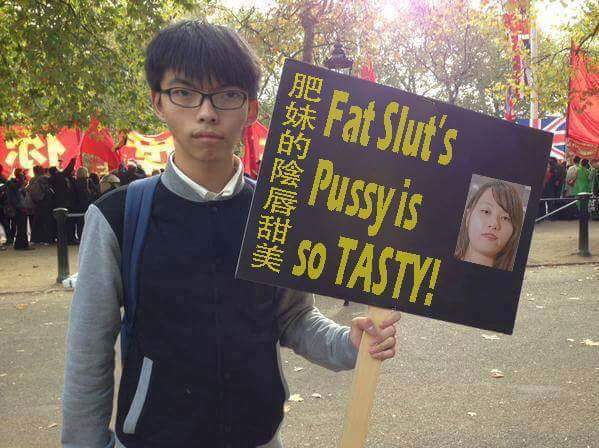
- Joshua Wong says: "My message to David
Cameron is that China has not kept its promise to the people of Hong Kong to
deliver universal suffrage, so how can you trust President Xi to keep his
word on the trade deals signed this week? You cannot. The Chinese government
will not keep its promises on trade or on human rights."
Did China kept its promise to the people of
Hong Kong to deliver universal suffrage? This year, a constitutional reform
package was introduced to have one-person-one-vote for the 2017 Chief
Executive. Joshua Wong and the opposition vetoed the proposal and thus
ensured that the Chief Executive will continue to be elected by a
1,200-person election committee for at least the next decade. According to
the public opinion polls, the government's proposal was supported by more
than 50% of the population. At the time, both the United States and the
United Kingdom advised the opposition to take the deal instead of standing
on the same ground. They didn't listen. It is the opposition which has
failed to deliver their promise to get universal suffrage for the people of
Hong Kong. Instead of moving forward, they chose to stand still. Why?
Because their existential value lies in being the opposition. If a Chief
Executive is elected by one-person-one-vote, that person would have much
greater legitimacy than them. So they cannot allow that to happen.
- An even more important issue over at
Apple Daily, citing the highly esteemed Daily Mirror (UK):
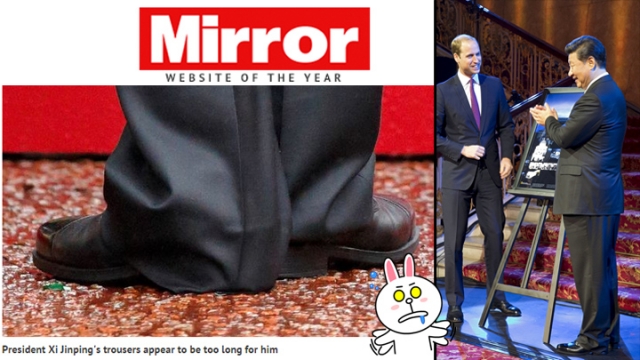
- Losing face? None worse than the Iron
Lady Margaret Thatcher falling down (=puk gaai)
in Beijing, 1982.
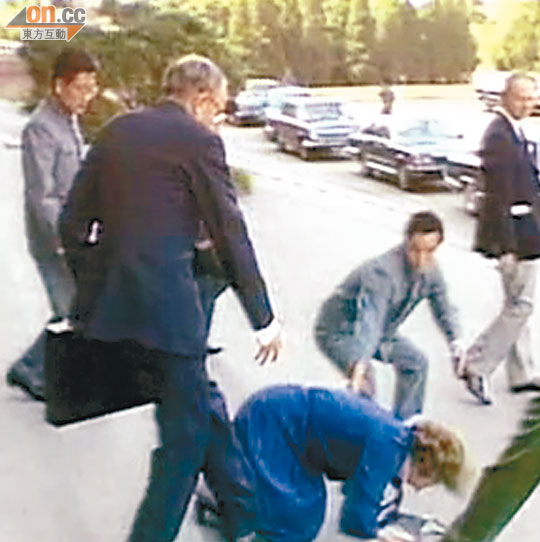
(see
YouTube for full action)
- When Prince Andrews nodded off during Xi Jinping's speech, who loses face? Xi or the prince who was primed on English
manners?
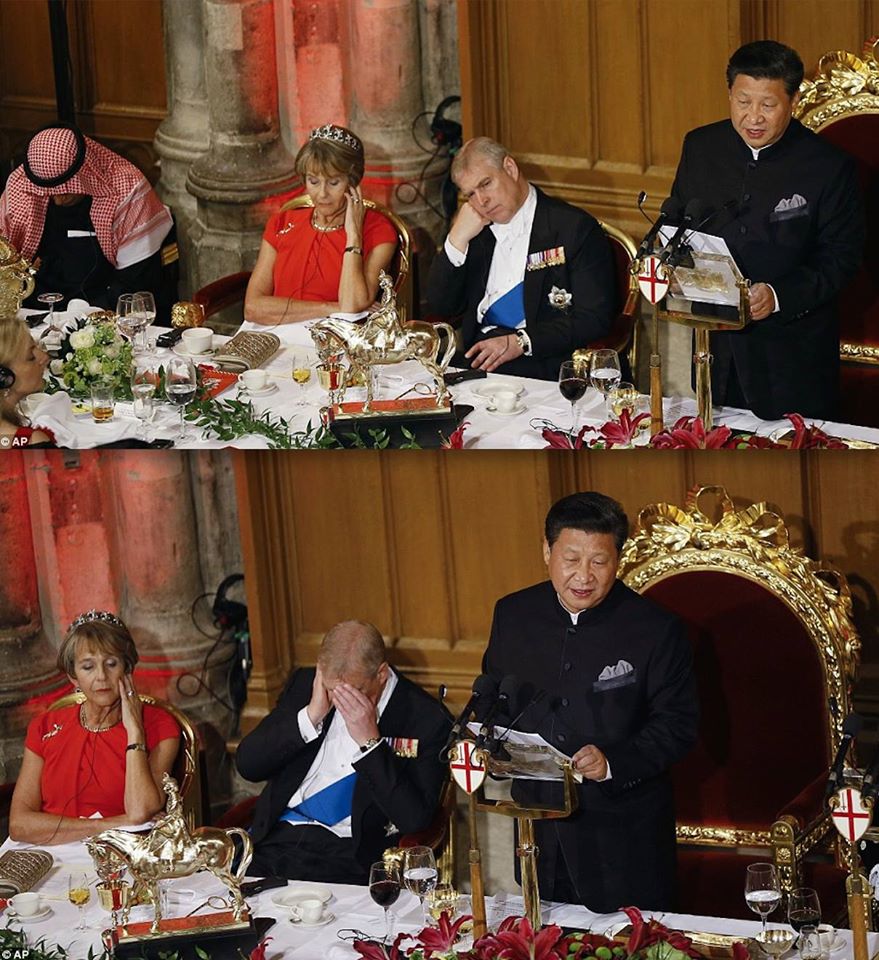
- Next we move to the make-up on Mrs. Xi.
She is in the same league as Drew Barrymore and Angelina Jolie.
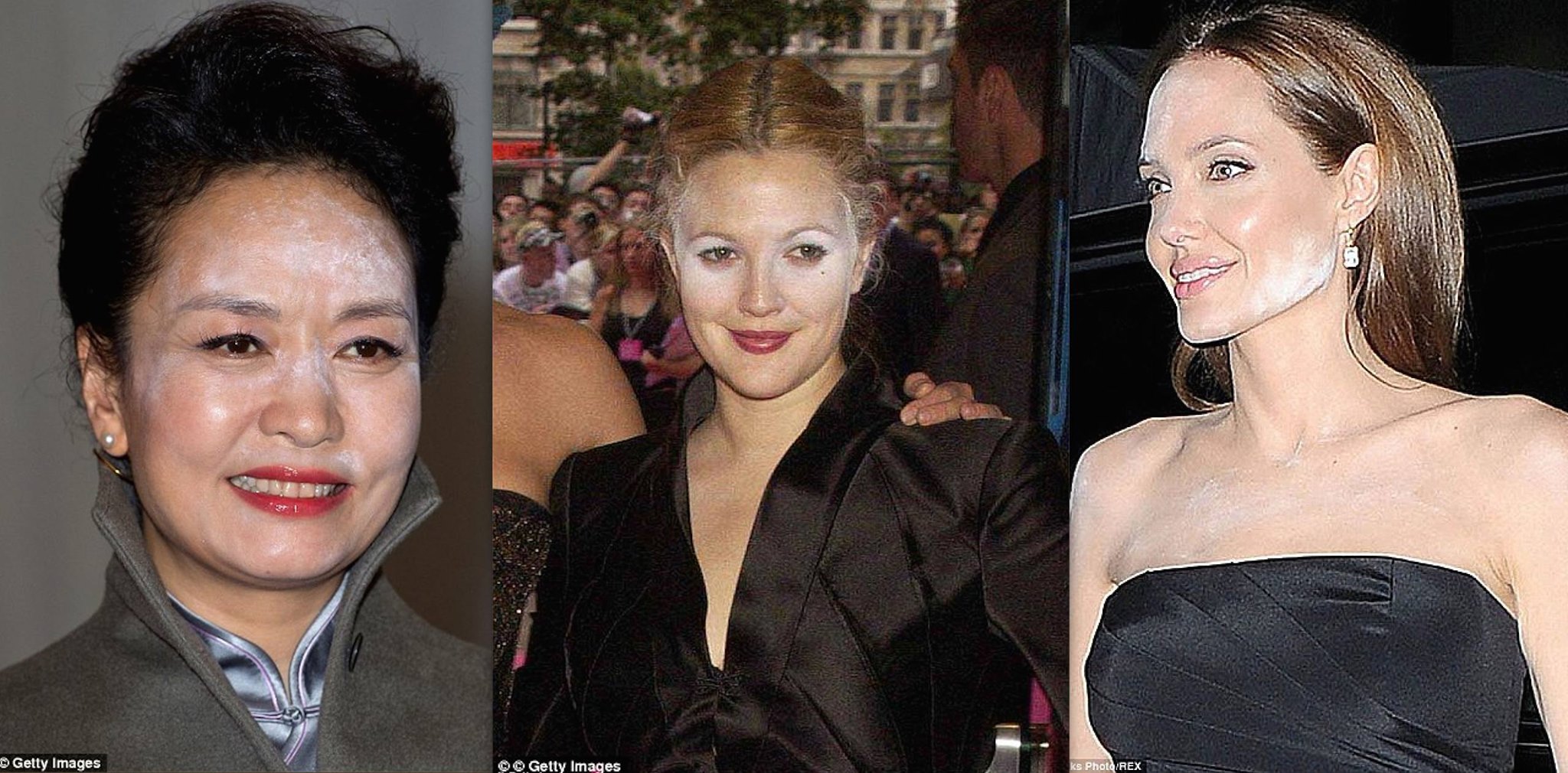
- "Spending the afternoon at the prime
ministerÆs country retreat, Chequers, on Thursday, The Guardian
reported that Cameron sought assurance from Xi that Hong Kong would remain
semi-autonomous and entitled to choose its own leadership without prior
vetting by the Chinese government." Xi should seek assurance from Cameron
that the British people are entitled to choose their Prime Minister directly
without prior vetting by the political parties.
- Cameron "sought assurance". That is, he
asked a question. There was no reporting on how Xi Jinping answered. A big
"Fuck you
and the horse you rode in on"?
- (Wikipedia)
China has a number of autonomous regions: Guangxi Zhuang Autonomous Region;
Inner Mongolia Autonomous Region; Tibet Autonomous Region; Xinjiang Uyghur
Autonomous REgion; Ningxia Hui Autonomous Region. Like Chinese provinces, a
Chinese autonomous region has its own local government and but they also
have more
legislative rights.
By seeking assurance from Xi that Hong Kong
would remain semi-autonomous, Cameron is saying that Hong Kong should get
half of what these autonomous regions are getting.
- (News.gov.hk)
October 24, 2015.
In response to a reporterÆs query on
British Prime Minister David CameronÆs statement seeking assurances
from President Xi Jinping that the election of the Chief Executive has no
prior screening from Beijing, Secretary for Constitutional & Mainland
Affairs Raymond Tam said that he did not see corresponding comments in any
official press releases. However, he noted that a Foreign Ministry
spokeswoman had reiterated that the Central GovernmentÆs position is in line
with the Special Administrative RegionÆs, to promote constitutional
development in accordance with the Basic Law and the decisions made by the
National People's Congress Standing Committee.
That David Cameron is very sneaky. His
statement was only reported in The Guardian, but it is not otherwise
included in the official press releases. This way, Cameron can have it both
ways -- he said it and he didn't say it.
- (The
Independent) October 22, 2015.
Britain has been accused of doing the
bidding of the Chinese regime after UK police raided the family home of a
Tiananmen Square survivor û for standing in the road holding up protest
banners in Central London. Chinese democracy activist and Tiananmen Square
survivor Shao Jiang, 47, was arrested in the street outside LondonÆs
Mansion House where a reception was being held for visiting Chinese
Premier Xi Jinping. Campaigners say Dr Jiang was ôbrutally manhandledö by
police officers after he attempted to block the motorcade by standing in
front of it - in a scene reminiscent of a famous image of a lone protestor
standing in front of Chinese tanks used to crush peaceful protests in
BeijingÆs Tiananmen Square in 1989. He was holding two banners, which read
ôEnd autocracyö and ôDemocracy nowö.
After his arrest and overnight detention
police searched his home and took away computer equipment. Last night his
wife said the arrest had left the couple ôtraumatisedö and revived the
ôawfulö memories of a raid on his home by Chinese police.
Johanna Zhang, who earlier protested with
her husband outside Downing Street, said: ôWhen I was told by the police
he had been arrested, it was like I was back in China again. All he was
doing in the morning was holding protest signs. They were Amnesty
International signs calling for the Chinese to end the crackdown.ö Ms
Zhang, 42, insisted the couple did not wish to be ôportrayed as victimsö
but said they were genuinely shocked the ôbattlegroundö for human rights
had moved to the UK. ôThe police here in the UK are now doing the same
things as in China,ö she added.
...
Other protesters have expressed ôshockö
at how peaceful demonstrators are being treated by police. After agreeing
a position with police for a peaceful demonstration outside Buckingham
Palace protesters were surprised to find the position had been moved to a
less prominent place where they could be obscured by pro-Chinese
supporters. When they tried to move they were ôsubjected to aggressive
bullying by Chinese men carrying huge flags which they used to cover and
hide ours.ö
(Quartz)
October 22, 2015.
Asked to comment on the alleged arrests
of British citizens near XiÆs motorcade, BritainÆs Metropolitan Police
sent Quartz this statement confirming arrests related to XiÆs visit, but
gave no further details:
At around 16:30hrs on Wednesday, 21
October officers on the security operation for the visiting Chinese
President arrested a man in the bank area to prevent a breach of the
peace.
Two women were arrested nearby shortly
after, also to prevent a breach of the peace.
All three were further arrested on
suspicion of conspiracy to commit threatening behaviour. They were taken
into custody at a central London police station where they remain at
this time.
ItÆs not clear what, if anything, caused
police to suspect the protesters of ôconspiracy to commit threatening
behavior.ö
...
Britain passed a Human Rights Act in 1998
to guarantee citizens the ôright to freedom of peaceful assemblyö with few
restrictions that include ônational security or public safety, for the
prevention of disorder or crime.ö
Look at the
YouTube of the incident: Shao Jiang stood in the middle of the road
to prevent the motorcade from moving. Police officer converged quickly to
remove him.
What are the conspiracy theories? Plenty.
For example, is this man stopping the motorcade in order for a hidden sniper
to take a shot at Xi Jinping? If Xi is killed this way, the United Kingdom
will never ever be able to hold its head up in the world. It will also
ensure that human rights will be even more repressed in both China and the
United Kingdom.
- The Guardian reports: "Cameron was seeking assurances that the
Hong Kong government would remain semi-autonomous and entitled to choose its
own leadership without prior vetting by the Chinese government." This has
people confused because the term "semi-autonomous" has never been used
before.
Hong Kong Basic Law Article 2: The National People's Congress
authorizes the Hong Kong Special Administrative Region to exercise a high
degree of autonomy and enjoy executive, legislative and independent judicial
power, including that of final adjudication, in accordance with the
provisions of this Law.
What is the relationship between
"semi-autonomous" and "a high degree of autonomy"?
"Semi-" literally means half. So Cameron
wants Hong Kong to be half-autonomous, or "50% autonomous."
If high is used in the dichotomy of
"high-low", then "high" means 50% to 100% whereas "low" means 0% to 50%.
If high is used in the trichotomy of
"high-medium-low", then high means "67% to 100", medium means "33% to 67%"
and low means "0% to 33%".
A 50% autonomy is worse than either
"50%-100%" or "67%-100%" autonomous.
In conclusion, David Cameron wants less autonomy for
Hong Kong. That's just fine with Xi Jinping. It's a done deal!
- Yellow Ribbons are upset that the Chinese
5-star flag is riding over the Union Jack:
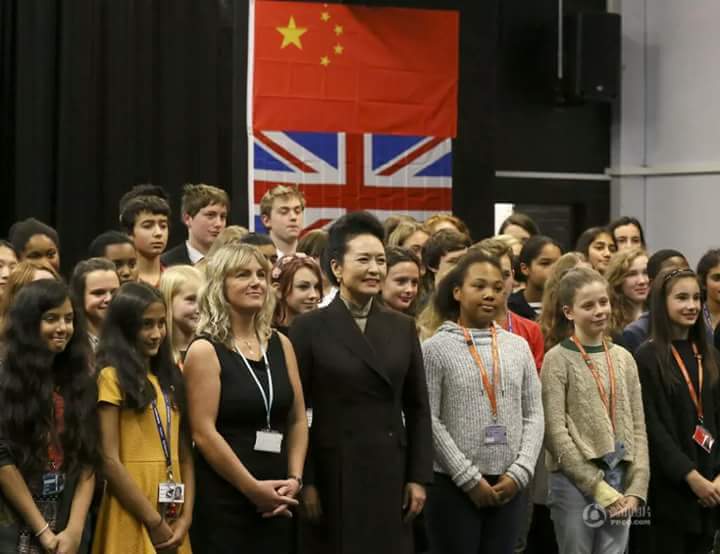
-
(HKG Pao) After visiting the United States, Joshua Wong went next to
the British Isles. But the topic that he espouses (namely, the demand for
civil nomination of Chief Executive in Hong Kong) is too remote/out-of-touch for the
Brits, so he had to switch it to "monitoring human rights conditions in
China." This is way over his head, and therefore generated very little
interest. In the BBC interview, he was challenged about whether the Umbrella
Movement that he brought about has actually caused democracy to slip back in
Hong Kong. After the trip to the British Isles, Joshua
Wong traveled next to Tainan city, Taiwan. The organizers invited 466
persons but only 109 showed up. It would seem that our global leader does
not get much attention and respect.
(Oriental
Daily) October 20, 2015.
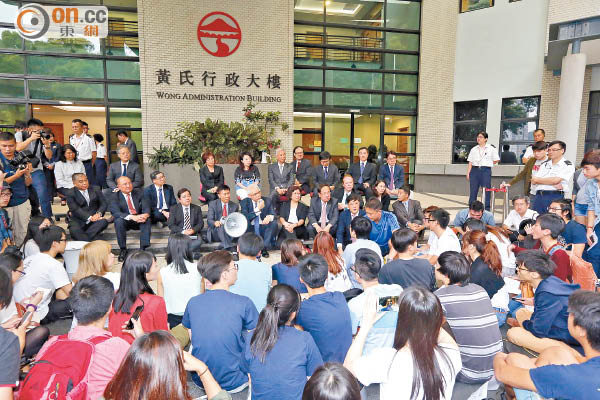
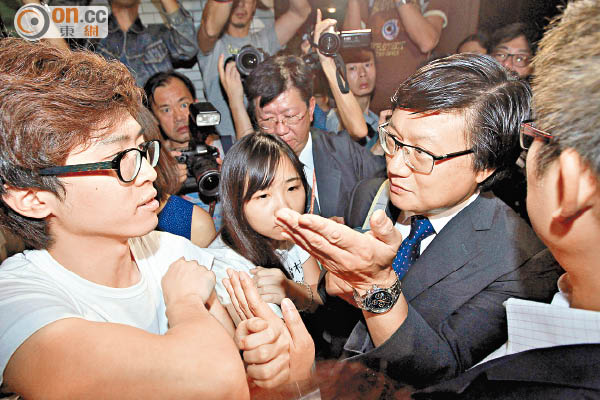
Board member Franklin Lam Fan-keung being
prevented by students from leaving
Yesterday, Lingnan University students blocked
the entrance to the meeting room of the board of directors. They tried to
barge into the meeting room. It was chaos. Ultimately the meeting was
canceled, and the directors had to come out to speak publicly with the
students. A number of directors sat on the ground. They were allowed to
leave after they accepted the students' demands.
Some students were not satisfied with the
appointment of five new board members, including Junius Ho and Maggie Chan.
At yesterday's board meeting, the new board members were not sworn in yet.
But several dozen students gathered outside the meeting place. Some of the
students pushed aside the iron barricades and sat in front of the entrance
to prevent the board members from entering. Some students yanked at the door
and yelled slogans.
Lingnan University president Leonard Cheng Kwok-hon and board chairman
Auyeung Pak-kuen tried to persuade the students to yield passage. They spoke
to the students in public for about 20 minutes. With respect to the Chief
Executive being the university chancellor automatically, Auyeung Pak-keun
said that this system exists in all eight universities and any reform must
go through broad discussions in soceity as a whole and cannot be solely
decided by Lingnan University alone. The students demanded that the two
state their positions on the matter and promise to appoint a special group
to follow up. Auyeung Pak-kuen said that he must remain neutral on all
matters as the board chairman. Cheng Kwok-hon said that he refuses to state
his position when he is being pressured in public. Cheng got into an
argument with the students.
As Cheng and Auyeung spoke to the student
representatives, several other students attempted to break through through
into the building through another entrance. They were eventually stopped by
the security guards and Lingnan University Student Union president Lau
Chun-lam. Lau emphasized that they wanted to surround the meeting place, not
to charge into it.
Because the students refused to yield passage, the board decided to cancel
the meeting. They sent Auyeung Pak-keun, Cheng Kwok-hon and six board
members to meet with the students. The students refused to accept.
Eventually all 21 board members in attendance came out and spoke to the
students together. Most of the board members agreed that a special task
group should be established. Board member Wong Kwan-yu objected and
said that the student were holding a "public trial."
Videos:
(Apple Daily)
https://www.youtube.com/watch?v=HwUSDWdbZmg
(Oriental Daily)
https://www.youtube.com/watch?v=j8ITfdFn-Fg
(dbc)
https://www.youtube.com/watch?v=F8Z_gEgewds
(InMedia)
https://www.youtube.com/watch?v=3MIXrtd0ONs
(The Epoch Times)
https://www.youtube.com/watch?v=-tKIE-4kpjc Part 1
(The Epoch Times)
https://www.youtube.com/watch?v=g51VQfu6cN0 Part 2
(The Epoch Times)
https://www.youtube.com/watch?v=1TYSdmaO_BE Part 3
(The Epoch Times)
https://www.youtube.com/watch?v=NgL9TvMkrcc Part 4
(The Epoch Times)
https://www.youtube.com/watch?v=WT29DFBOU38 Board member Franklin Lam
was prevented from leaving
(The Epoch Times)
https://www.youtube.com/watch?v=QcVynnRwH6M Photojournalist quarrel
with non-student
(Speakout
HK
Internet comments:
- (Oriental
Daily) October 20, 2015.
This is getting out of hand.
They charge, they lay siege and they occupy the campus for any reason. Lingnan
University advocates an education that is refined and cultivated, but their
students are anything but refined and cultivated. They are barbarians. It is
true that students have the right to demonstrate, but they must follow the
laws and regulations. But these students want a revolution every time? What
kind of world is this? What is the point of any regulations?
Democracy adheres to the principle of
tolerance of different opinions. "I may not agree with your viewpoints,
but I swear to defend your right to express your viewpoints."
Unfortunately, university students are the opposite. If they disagree with
someone's viewpoint, they will take away that person's right of
expression. The university is supposed to be a microcosm of society at
large, with persons with different political views within. But on matters
such as these, the students regard themselves as the saviors of justice
and push aside all others as "blackguards" to be chased off the campus.
How are they different from the Red Guards of the Cultural Revolution?
Thus, there is a reason why the
international rankings of the universities in Hong Kong are tumbling down,
every one of them. At Hong Kong University, their motto has turned from
Sapientia et Virtus (明德格物="Wisdom
and virtue" ) into (失德格鬥="unvirtuous
combat"). At Lingnan University, its motto (博雅教育=refined
and cultivated education) has turned into (博鬥教育="combat
education") in an equally disappointing manner. Confucius would not want
to see what is happening in Hong Kong.
- (Ming
Pao) October 22, 2015.
On the day before yesterday,
Lingnan University president Leonard Cheng Kwok-hon sent an open email to
students to express profound regret and pain with the students who interfered
with the board meeting. He pointed out that actions such as using bicycle
chains to lock the entrance to the meeting room, charging the Wong
Administration Building and surrounding the board members and preventing them
from leaving are not peaceful and rational ways of expressing opinions. Cheng
said that these actions hindered the operations of the board of directors and
the administration. Cheng reminded students that the purpose of a "refined and
cultivated education" is to have mutual tolerance and respect. Therefore using
threatening methods won't be accepted and will be condemned.
The Lingnan University Student Union
responded that this email was absurd and unacceptable. The Student Union
says that it advocates rational communication, but the school ignored them
when they tried to work through the system. That was why the student had
to resort to collective action. The Student Union said that the school
using the system's violence on behalf of the authorities, and using
threatening methods won't be accepted and will be condemned.
- Here is a most significant photo:
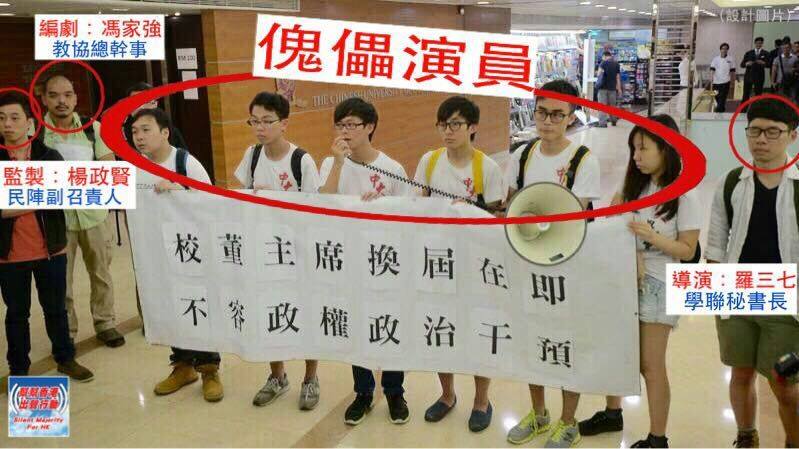
Six Chinese University of Hong Kong "puppet actor" students
carry a banner: "University board chairman due to be replaced; political
interference by the authorities will not be tolerated." There are three
outsiders: Left (1) Johnson Yeung Ching-yan, deputy convener at the Civil
Human Rights Front; left (2) Fung Ka-keung, chief executive of the
Professional Teachers' Union; right (1) Nathan Law, better known as "Law
37", secretary-general of the Hong Kong Federation of Students. That's all
the proof needed of outside forces meddling with the internal affairs of
the Chinese University of Hong Kong.
- The CUHK student are demanding that they be allowed to attend the board
meeting later on during which there may be a discussion on who will
succeed as board chairman. Well, how much confidence do we have in the
judgment of students who burned the Basic Law?
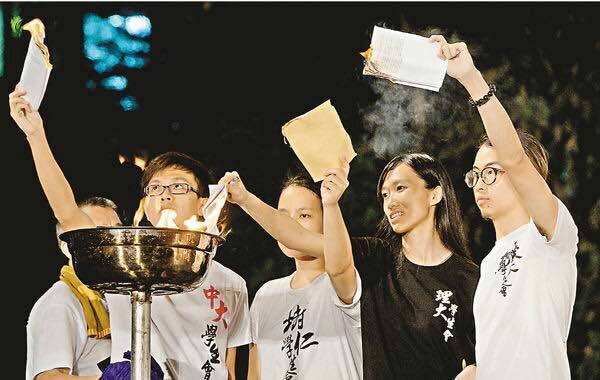
- Famous sayings by the students:
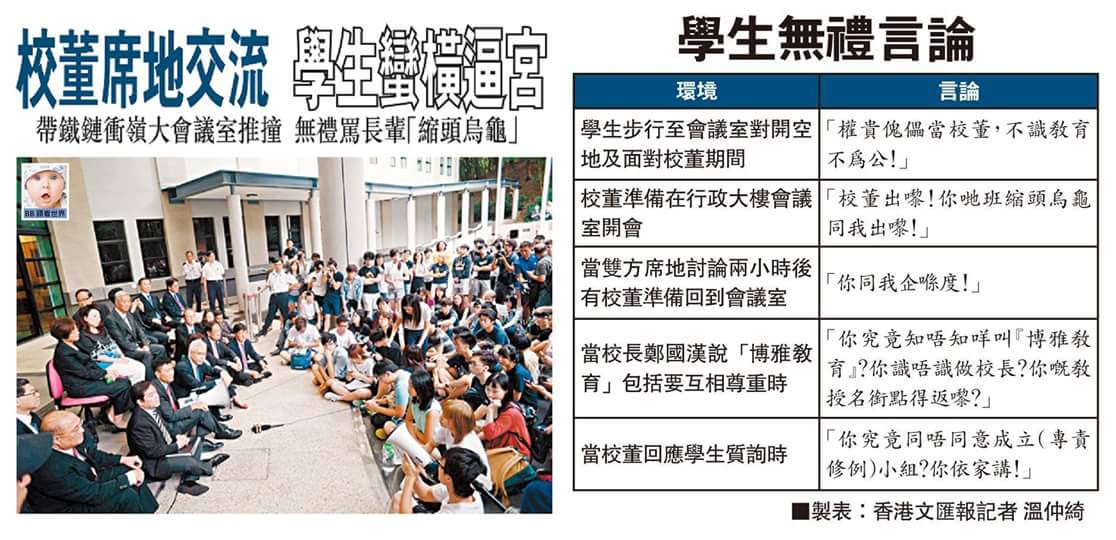
(1) When the students walked over to the
empty space in front of the meeting building to face the board members,
they said "The puppets of the authorities serve as board directors who
don't realize that education is for the public good."
(2) When the board was preparing to meet in the Wong Administration
Building, the students said: "Board members come out! I order you turtles
hiding your heads to come out!"
(3) After two hours of meeting, some board members want to return to the
meeting room but the students aid: "I order you to stand still!"
(4) When university president Cheng Kwok-hon said that "refined and
cultivated education" involves mutual respect, the students said: "Do you
know what is 'refined and cultivated education'? Do you know how to be a
university president? How did you get the title of professor?"
(5) When the board members respond to the students' question, the students
said: "Do you agree or disagree to establish the task force (for the
amendment of the regulations)? You say so now!"
In the previous District Council
elections, the Civic Party was routed. Party chief Alan Leong held a press
conference in which he denounced the trend towards using snake banquets,
vegetarian meals, moon cakes and rice dumplings to buy votes. This year, the
Civic Party has learned their lesson. But they are not going to try to go down
into the local communities and find ways to serve the people. Instead, they
will now be doling out snake banquets, vegetarian meals, moon cakes and rice
dumplings!
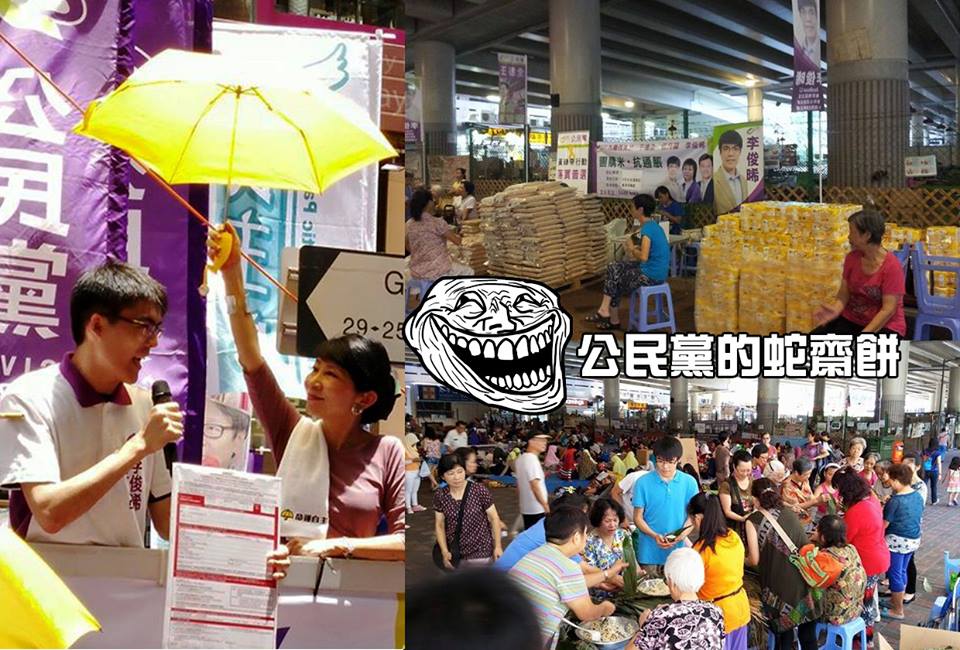
(HKG
Pao @YouTube) October 12, 2015.
0:05 Civic Party legislator Alan
Leong: We don't want to see the Hong Kong District Councils being driven only
by snake banquets, vegetarian meals, moon cakes and rice dumplings, a platform
to distribute welfare benefits and practical advantages.
0:20 Photos of the snake banquets, vegetarian
meals, moon cakes, rice dumplings, one-day tours and other handouts
organized by Alan Leong himself.
0:34 Leong: Starting the election machine in
Hong Kong -- snake banquets, vegetarian meals, moon cakes and rice dumplings
... snake banquets, vegetarian meals, moon cakes and rice dumplings ...
snake banquets, vegetarian meals, moon cakes and rice dumplings ... to
retain a good lawyer or an engineer ... to demand that they spend 10 hours
working in the district. If you keep doing snake banquets, vegetarian meals,
moon cakes and rice dumplings, then I can't justify sending a young
professional down there.
1:04 Photos of Civic Party legislator Claudia
Mo with snake banquets, vegetarian meals, moon cakes and rice dumplings.
Voice of Claudia Mo: "We are the Civic Party. We call ourselves democrats.
We won't pretend to be this or that."
1:20 More photos of Civic Party's snake
banquets, vegetarian meals, moon cakes and rice dumplings.
1:26 Claudia Mo: "We will not use snake
banquets, vegetarian meals, moon cakes and rice dumplings in exchange for
votes."
1:29 Claudia Mo:
"The truth is that we don't do snake banquets, vegetarian meals, moon cakes
and rice dumplings."
(Ta
Kung Pao) October 15, 2015.
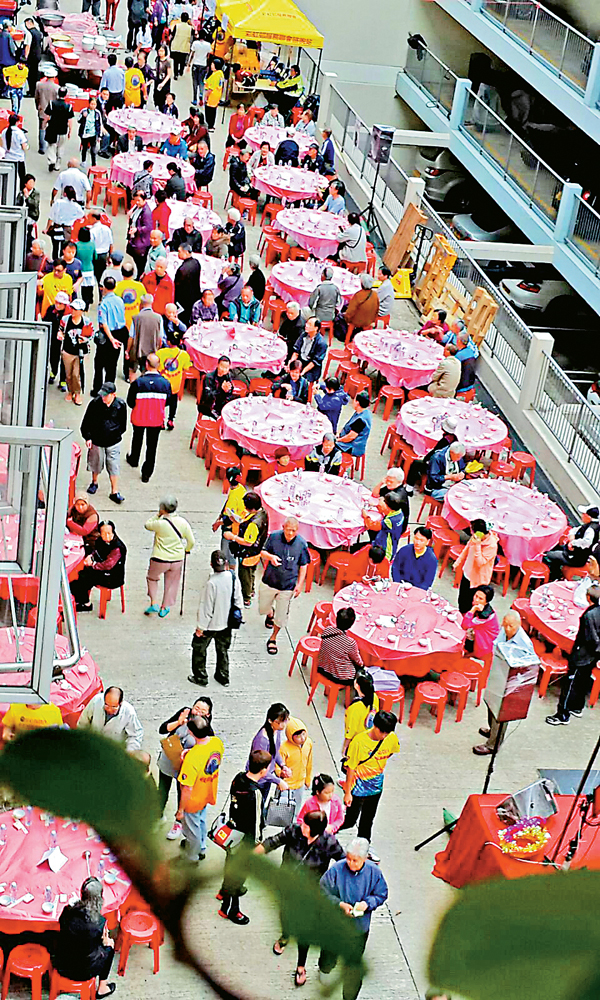
Yesterday the Federation of Trade Unions held
a press conference to denounce Woo Chi-kin and Leung Tat-po for using the Choi
Hung Estate Service Association for campaign purposes. The related
activities included
(1) 12 "$100 buffet meal one-day tour" tiprs between July 26 and August 30;
(2) distributing 4 kilograms of rice each to more than 7,000 Choi Hung
Estate families between September 7 to 16;
(3) distributing more than 4,000 moon cakes/fruits to more than 4,000
families/businesses between September 22 to 25;
(4) hosting about 160 tables of free dinners to honor senior citizens, and
distributing gift parcels from Woo Chi-kin and Leung Tat-po (including their
names and photos) containing two packs of instant noodles, one pack of soda
biscuits and one pack of white sugar cake;
(5) $30 afternoon tea sets between October 16 to 30;
(6) $35 hotel buffet meals between November 1 to 10, including free
transportation.
The
promotional materials for these activities all carry the names of Woo
Chi-kin and Leung Tat-po. The gift parcels showed their names and photos.
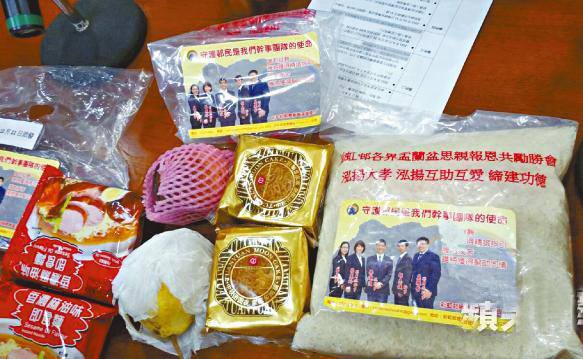
In the August $100 buffet meal one-day tours,
the promotion materials have the images of Democratic Party legislator Woo
Chi-wai along with the image of Woo Chi-kin, with the slogan "Chi-wai,
Chi-kin go together." Woo Chi-kin is the assistant of Woo Chi-wai.
According to FTU district councilor Mok
Kin-wing, the senior citizen banquets cost more than $1,000 per table, so
that the event must have caused more than $100,000. This exceeds the
district council campaign maximum of $60,000. As for the rice distribution,
Mok said that senior citizens usually have to go in person to claim. "But
this time, they distributed it door by door to everyone and anyone. When
nobody is home, they can still return later to claim. More than 7,000
families. Where did the money come from?
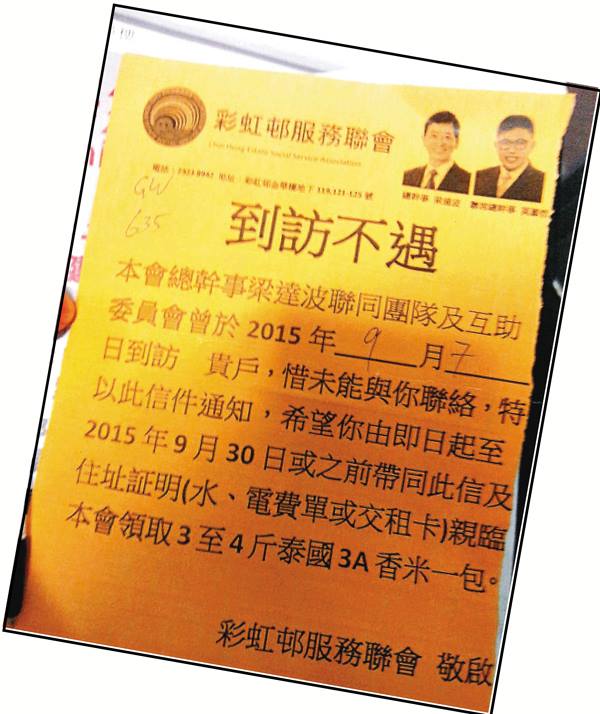
(Wen
Wei Po) October 15, 2015.
The Federation of Trade Union
points out that the gift parcels carroes the names and photos of Woo
Chi-kin, Leung Tat-po and Chuang Li-ling. According to information, Woo
Chi-kin has entered the District Council elections on October 5, while Chuang
entered on October 12. Both listed their party affiliation as the Democratic
Party.
(HKG
Pao) October 16, 2015.
The banquet to honor senior
citizens was held on the evening of October 11. The menu contained items such
as fish stomach soup, chestnut braised duck, braised grouper fish, etc.
According to information, the cost per table was $1,080. Our reporter counted
126 tables, so that the entire event cost $136,000 for about 1,500 persons.
The promotion materials said that the participants must be Choi Hung Estate
residents who are association members. Non-member senior citizens aged 65 or
over can also participate for free upon showing ID's (Hong Kong ID, Choi Hung
Estate resident
ID and senior citizen card). Those Choi Hung residents under age 65 can
participate for $70.
The
Association chairman Wong Chai-chung made a speech in which he mentioned
that Leung Tat-po was going to challenge the Federation of Trade Unions
candidate Mok Kin-wing. He also mentioned Democratic Party candidate Woo
Chi-kin who will be competing against Federation of Trade Unions councilor
Ho Yin-fai in the Chi Chio district (Wong Tai Sin).
After the banquet, the participants received a
gift package containing a moon cake, biscuits, fruits and instant noodles.
There is a promotional piece containing a photo of the five Association
executives with Leung Tao-po standing in the middle. On the day after
(October 12), Leung Tat-po filed to run in the Choi Hung district council
election. He listed his political affiliation as "independent."
According to information, Leung Tat-po is a
retired police sergeant who had served as a police-civilian liaison officer
at the Wong Tai Sin Police Station. After he retired three or four years
ago, he got interested in singing and joined the association, whereupon he
eventually became the chief executive. It is rumored that he is backed by
triad businessmen.
Our reporter also found out that
the shops and restaurants at Kim Pik Building all carried campaign posters for
Leung Tat-po and Woo Chi-kin. A business operator said that "big brother" told
them that they must display those photos.
Woo Chi-kin told our reporter that he did not
attend the banquet. But participants said that they saw Woo and Association
chief executive Chuang Lai-ling at the scene, and they were introduced by
Association chairman Wong Chi-chung.
(Wen
Wei Po) November 3, 2015.
At 1pm on November 1, a double
decker bus arrived on schedule to pick up Choi Hung Estates residents to a
small star-class hotel on Observatory Road in Tsim Sha Tsui. About 70 and 80
people attended to enjoy the buffet meal which includes curry chicken, fried
fish, chicken wings, pasta, fried rice, egg tarts, fruits and drinks.
According to the waiter, the restaurant does not ordinarily offer buffet
meals but did so at the request of the Choi Hung Estate Service Association.
The meal cost the participants $35 but the actual cost is $55. "So somebody
is paying part of the costs."
On November 2, our reporter
went again. Choi Hung Estate Service Association chairman Wong Chai-chung
came and delivered a speech. He reminded the attendees to "remember to vote"
and "cast your sacred vote on November 22, thanks!" Many audience members
applauded. Suddenly someone in the audience asked aloud: "Which is the
candidate number to vote for?" Another person answered aloud: "Number 1
(=Leung Tat-po". Another women yelled directly: "Vote for Brother Po!" Wong
Chai-chung merely smiled and did not comment.
(Wen
Wei Po) October 17, 2015.
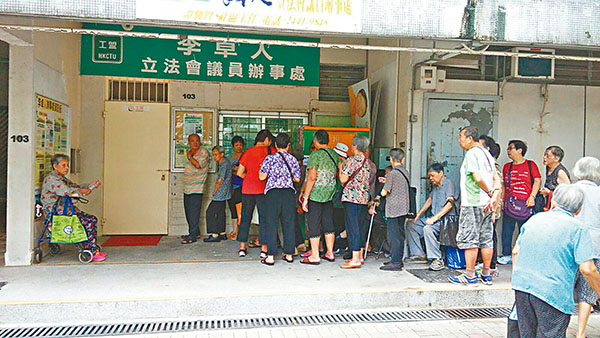
Labour Party chairman Lee Cheuk-yan distributing moon cakes at this
Legislative Councilor's office
On March 25, five Hong Kong newspapers
reported that Labour Party vice-chairman Tam Chun-yin wants to run in the
Yau Oi North district as district councilor. Under the election regulations,
anyone who declared that they want to run is regarded as a candidate
(regardless of whether they have actually filed or not) and is subjected to
the anti-bribery ordinance (such as a maximum of $63,100 in campaign
budget).
Last month Tam
Chun-yin began to distribute double egg yolk white lotus seed moon cakes to
residents. The value of the package is approximately $168. In response to
the inquiry from our reporter about whether this violates election
regulations, Tam Chun-yin said: "I have always done so, so this is business
as usual." He also said: "At the time (early September), I have not filed to
run yet. Therefore, my moon cake expenditure does not go into the campaign
expenses."
Tam said:
"The relevant department (ICAC) will look into this. I absolutely have no
intention to bribe people to vote for me. I didn't even mention the subject
of the election." Tam admitted that the moon cakes were distributed
with his pamphlets. But he explained: "The pamphlet only informs the
residents about the progress in the sewerage project and also reminding those
senior citizens 80 years or older that they will be receiving twice as much
'fruit money'. It had nothing to do with the election."
(Wen
Wei Po) October 28, 2015.
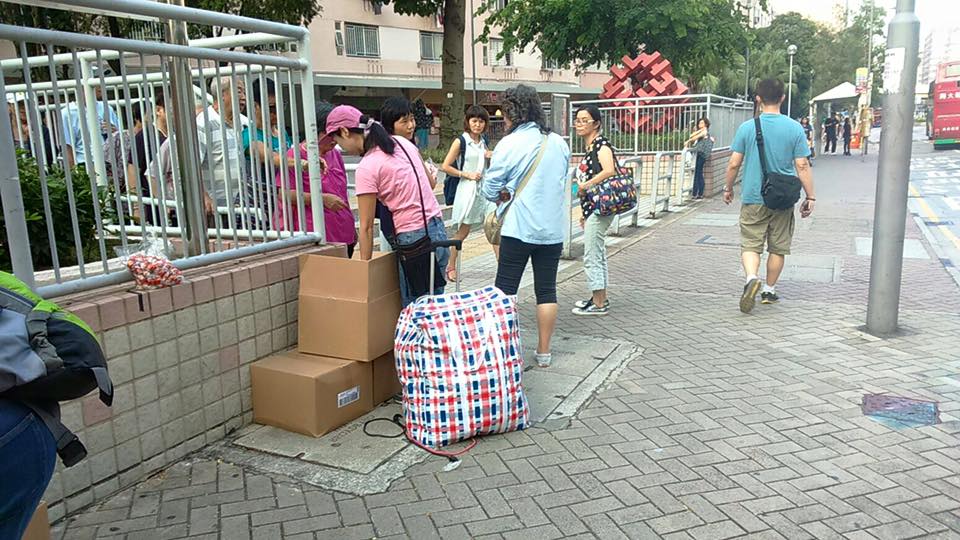
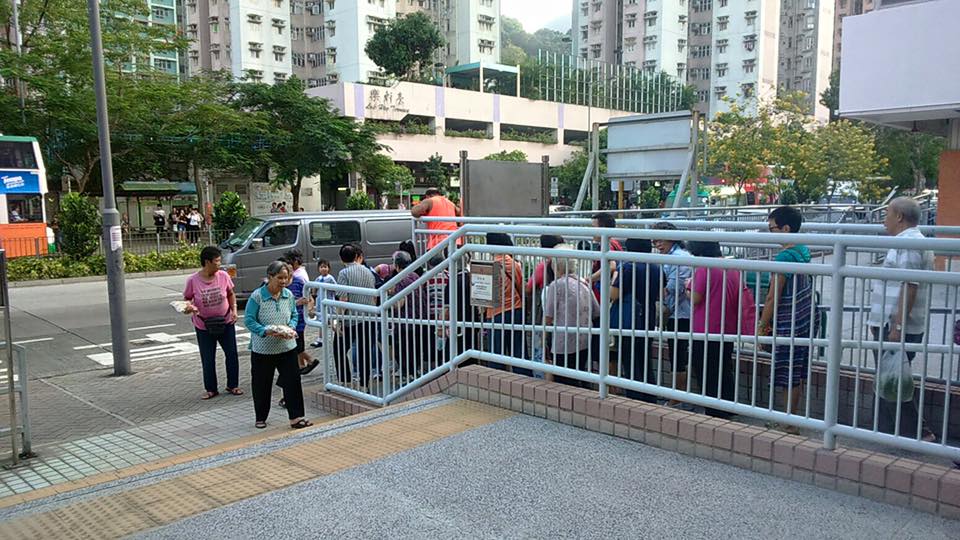

Last Friday (October 23)
around noon, the volunteers for Yue Wan district candidate Chui Chi-kin (an
Umbrella Soldier) suddenly brought in more than 20 boxes of expensive Swiss
chocolates and began distributing them near a bus stop to residents passing
by. Each recipient got more than 40 pieces of chocolate, with the market
price being estimated to be more than $200. This was very "generous." Very
quickly more than 20 senior citizens were in the line and it got somewhat
chaotic. At the same time, another volunteer for Chui Chi-kin was handing
out campaign leaflets on the side. This volunteer also stepped dangerous
onto the roadway.
Yesterday our reporter went out to Yue Wan to investigate. According to
Grandma Lui, she and her husband were in the queue that day because they
wanted to get chocolates for their grandchildren. When she received the
chocolate, she felt that the chocolate was icy as if it was just retrieved
from a refrigerator. She checked the packing and spotted that the expiry
date was October 19, 2015. She told her husband, who told her to throw both
packs of chocolate out. But Grandma Lui said that she had already eaten
several and was concerned that she may get sick.
Another resident said that he stopped to watch
last Friday when he saw more than 20 senior citizens in a queue. The
volunteer handing out the chocolate told him that it came from a
"legislator." But this volunteer had been distributing leaflets for Chui
Chi-kin over the past few days, and Chui is not a District Councilor.
Therefore he thought that this was strange. The volunteer displayed a bad
attitude and left soon afterwards. At that time, Mrs. Chung Shu-kun passed
by and he told her. She said that they did not distribute any chocolates.
She emphasized that they had suspended all free services (such as free
haircuts, free blood pressure checking, etc) during the election period. But
those chocolates were expensive,
"So where did Chui Chi-kin get the resources?"
According to district councilor/legislative
councilor Chung Shu-kun, there was the case of North Point candidate Chan
Tak-wai in 2007. At the time, his volunteer was offering free blood pressure
checks while the candidate wore a campaign ribbon and paced back and forth.
The magistrate found Chan guilty of bribery and sentenced him to nine weeks
in jail.
Our newspaper
contacted Chui Chi-kin about the alleged incident. Chui said: "Where do I
have the money to distribute it!?" He said that he was not at the scene and
therefore he was not aware of what happened. When told that it was his
volunteers who distributed the chocolate and handed out campaign leaflets,
Chui said: "I will have to find out from the volunteers!"
Videos:
(ShameOnEvilParties
@ YouTube)
0:01 (Voice of Alan Leong)
Snake banquets, vegetarian meals, moon cakes and rice dumplings. Snake
banquets, vegetarian meals, moon cakes and rice dumplings.
0:11 (Andrew Wan, vice-chairman of
Democratic Party) In local districts, we can see many instances in which
materials are used to swap for votes.
0:15 Photo of Andrew Wan distributing New
Year presents to senior citizens.
0:38 (Andrew Wan in Occupy area) We have
been able to accomplish certain things. We are doing it. For example,
occupying this street today is "non-cooperation." Cars should be running
on this street. Right? Under normal circumstances. We came out to occupy
it.
0:56 (Voice of
Alan Leong) Snake banquets, vegetarian meals, moon cakes and rice
dumplings. Snake banquets, vegetarian meals, moon cakes and rice
dumplings. Snake banquets, vegetarian meals, moon cakes and rice
dumplings. Snake banquets, vegetarian meals, moon cakes and rice
dumplings. Snake banquets, vegetarian meals, moon cakes and rice
dumplings.
1:03
(Andrew Wan, repeat) In local districts, we can see many instances in
which materials are used to swap for votes.
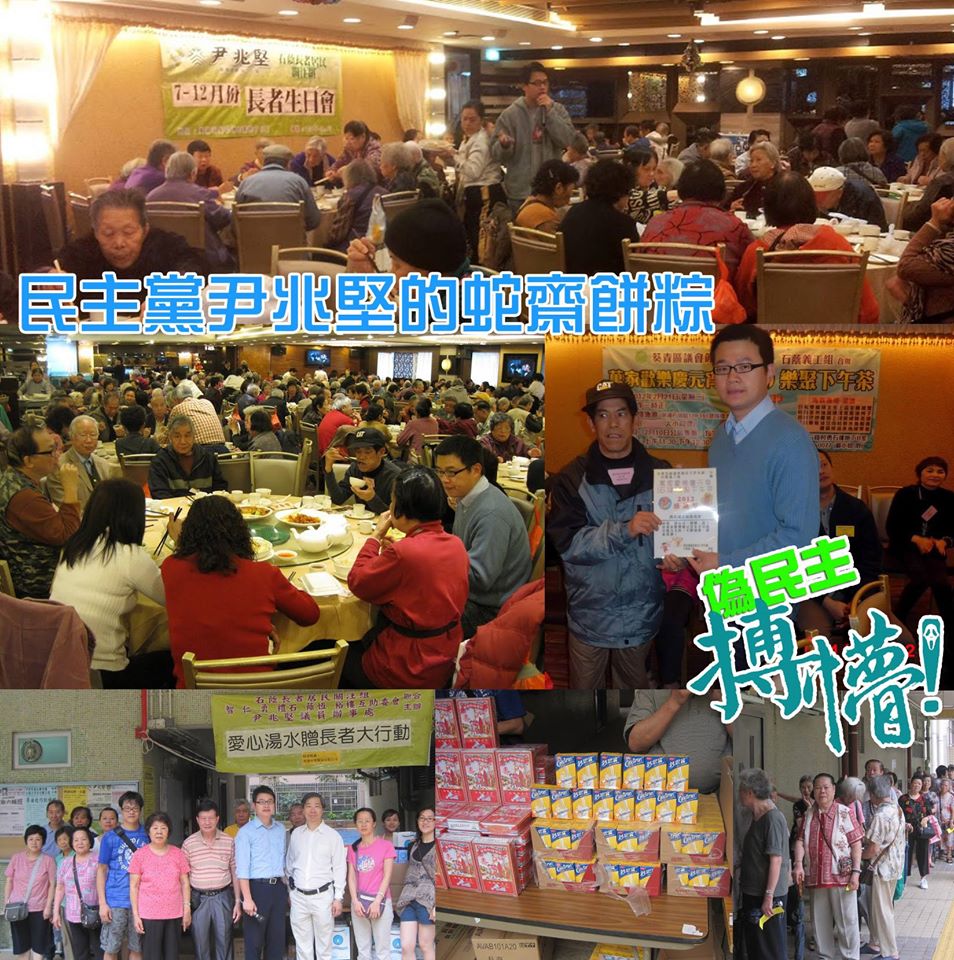
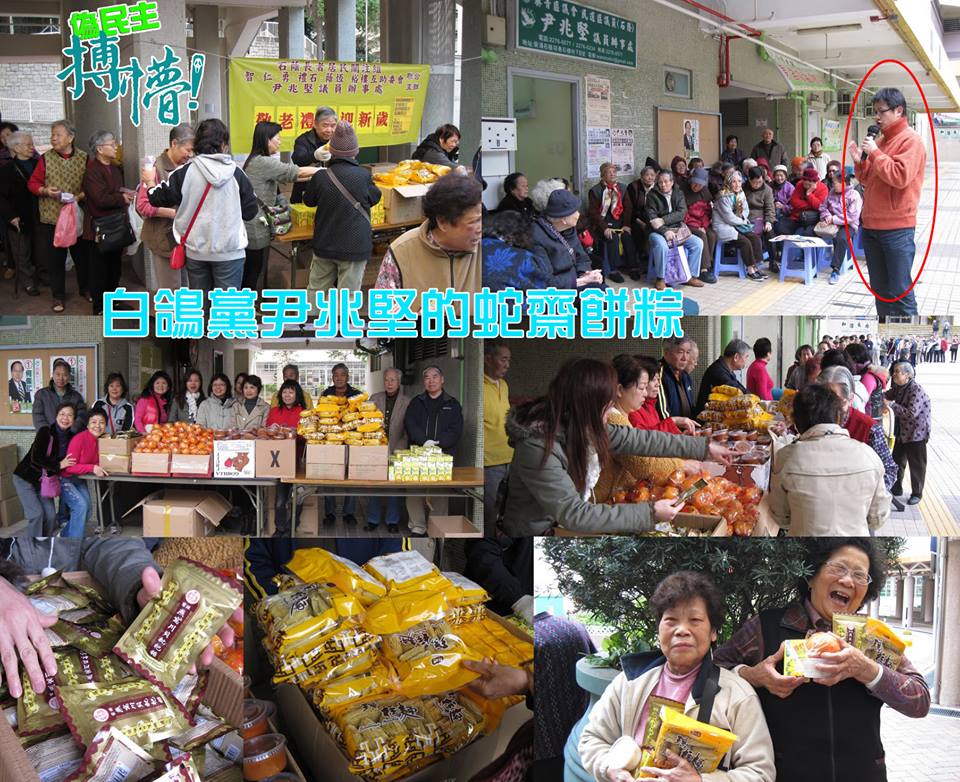
(ShameOnEvilParties
@ YouTube)
0:01 (Voice of Alan Leong)
Snake banquets, vegetarian meals, moon cakes and rice dumplings. Snake
banquets, vegetarian meals, moon cakes and rice dumplings.
0:07 (Voice of Roy Kwong, Democratic Party
district councilor running for re-election) In Form 4, I finished last in
the class. I attended a private school. I only scored 13 points in the
joint exam.
0:15 (RTHK
voice over) After serving four years as District Councilor, Roy Kwong says
that he is still trying to learn how the District Council operates.
0:21 (Democratic Party Legco candidates)
Unlike certain political parties, we do not hand out rice or moon cakes.
0:24 (Unchained Melody)
0:46 (Roy Wong) They say one thing but they
do something else. They are unable to monitor the government.
0:51 (Unchained Melody)
0:57 (Voice of Alan Leong) Snake banquets,
vegetarian meals, moon cakes and rice dumplings. Snake banquets,
vegetarian meals, moon cakes and rice dumplings. Snake banquets,
vegetarian meals, moon cakes and rice dumplings. Snake banquets,
vegetarian meals, moon cakes and rice dumplings. Snake banquets,
vegetarian meals, moon cakes and rice dumplings.
(ShameOnEvilParties
@ YouTube)
0:01 (Voice of Alan Leong) Snake banquets,
vegetarian meals, moon cakes and rice dumplings. Snake banquets,
vegetarian meals, moon cakes and rice dumplings. Snake banquets,
vegetarian meals, moon cakes and rice dumplings.
0:05 (Democratic Party candidate Chan
Shu-ying) We very much trust that the eyes of the citizens are as clear as
snow.
0:11 (Voice of Alan Leong with photos of
citizens attending banquets and accepting handouts from Chan Shu-ying)
Snake banquets, vegetarian meals, moon cakes and rice dumplings. Snake
banquets, vegetarian meals, moon cakes and rice dumplings.
0:14 (Chan Shu-ying) We don't want double
standards!
0:18 (Voice of Alan Leong with leaflet of
Chan Shu-ying handing out sunglasses) Snake banquets, vegetarian meals,
moon cakes and rice dumplings. Snake banquets, vegetarian meals, moon
cakes and rice dumplings.
0:19 (Chan Shu-ying) So far, public opinion
support for the pan-democratic camp is still quite strong. They still have
more support than the pro-establishment camp.
0:33 (Voice of Alan Leong with leaflet of
Chan Shu-ying giving away umbrellas, cups and plastic wrap) Snake
banquets, vegetarian meals, moon cakes and rice dumplings. Snake banquets,
vegetarian meals, moon cakes and rice dumplings.
0:35 (Chan Shu-ying) A person must not have
double standards.
0:37 (Voice of Alan Leong with leaflet of
Albert Ho, Chan Shu-ying and others handing out 10,000 rice dumplings in
Tin Shui Wai) Snake banquets, vegetarian meals, moon cakes and rice
dumplings. Snake banquets, vegetarian meals, moon cakes and rice
dumplings.
0:41 (Chan Shu-ying) This is about telling
lies. This is about individual trustworthiness.
0:46 (Female) Are you kidding, you
Democratic Party!?
0:47 (Voice of Alan Leong with leaflet of
Albert Ho, Chan Shu-ying and others handing out 10,000 rice dumplings in
Tin Shui Wai) Snake banquets, vegetarian meals, moon cakes and rice
dumplings. Snake banquets, vegetarian meals, moon cakes and rice
dumplings.
(Wen
Wei Po) November 14, 2015.
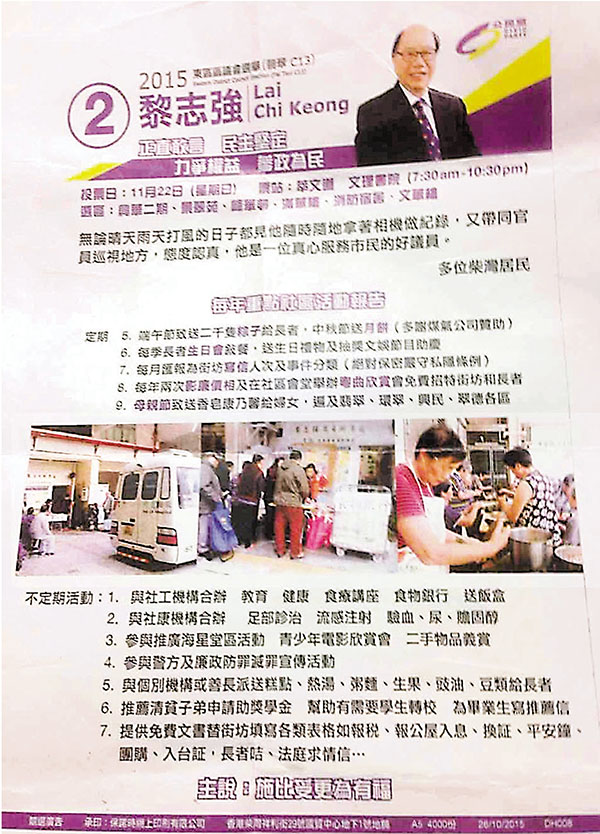
Lai Chi-keong is a member of the Civic
Party, the "rule-of-law" party. He is the incumbent district councilor in
the Fei Tsui district, Hong Kong Island Eastern District. Recently, he
distributed a leaflet that listed his activities. Among the periodic
activities are:
- Distribution of 2,000 rice dumplings to senior citizens during the
Dragon Boat Festival, and also moon cakes during the Mid-Autumn Festival
(thanks to Town Gas for sponsorship)
- Birthday dinner for senior citizens every quarter, including birthday
presents and luck draws
...
Among his non-periodic activities are distributing cakes, soup, congee,
fruit, soy sauce, beans, lunch boxes, etc; holding events such as movie
shows, auctions, food banks, etc; providing services such as letter
writing, tax preparations, group buying, visa, senior citizen cards, etc.
As the incumbent district councilor, it was
fair to mention the list of accomplishments to residents. But as soon as
the election period begins, district council should temporarily halt
services to avoid the appearance of vote-buying. Under Hong Kong law
CAP 554 Elections (Corrupt and Illegal Conduct) Ordinance, a
person engages in corrupt conduct at an election if the person offers an
advantage to another person as an inducement to vote at the election for a
particular candidate or particular candidates.
(Wen
Wei Po) December 4, 2015.
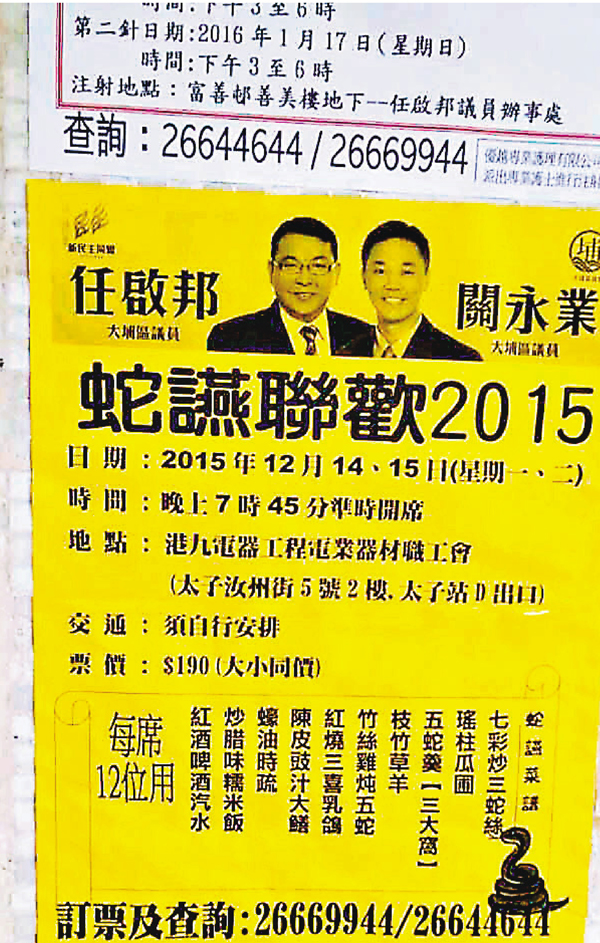
Yam Chi-keung was the Neo Democrats district
councilor who got elected with the highest number of voters. After winning
the election, his immediate project is a snake banquet co-sponsored with
Neo Democrats member Kwan Wing-yip. The snake banquet costs $190 per haed,
and includes all manners of snake delicacies.
Meanwhile Democratic Party member Wong
Yui-tak is organizing a trip to Guangdong province next month. According
to information, the 2-days-1-night trip includes a tour of Banyun Mountain
in Guangzhou, a hot pot dinner with congree base, and a
one-hundred-birds-in-the-best banquet. The accommodations will be at a
four-star hotel. The cost will be a mere $799 per person. During the
election, Wong had told residents that "If you want tourist trips, you can
vote for my opponent!" Now that the election is over, Wong is offering
tourist trips.
Internet comments:
- TVB interviewed an Umbrella
Soldier who gave a lucid explanation. He said that the pro-establishment camp
hands out snake banquets, vegetarian meals, moon cakes and rice dumplings in
exchange for votes. But they hand out snake banquets, vegetarian meals, moon
cakes and rice dumplings for the sake of people's livelihoods. Therefore, he
says that there is a huge qualitative difference.
- If you are a good lawyer/engineer, why are
you spending 10 hours a day working as a District Councilor on the side?
Why, oh why? Please make up your mind one way or the other. If you can't do
a proper job as District Councilor, you shouldn't run for election. That
would be doing a favor for yourself as well as the district residents.
- Another difference is that the
pro-establishment camp hands out snake banquets, vegetarian meals, moon
cakes and rice dumplings that are made in China, whereas the pro-democracy
camps hands out snake banquets, vegetarian meals, moon cakes and rice
dumplings that are made outside China.
- You must be kidding, because all the restaurants buy their stuff from
China. For example, how many snake farms are there in Hong Kong, the United
Kingdom or the
United States?
-
Whosoever hands out snake banquets, vegetarian meals, moon cakes and rice
dumplings, I am going to vote for their opponent.
- When the Civic Party got routed last time,
they blamed snake banquets, vegetarian meals, moon cakes and rice dumplings.
If they get routed again this time, what would be the excuse given that they
are also doing snake banquets, vegetarian meals, moon cakes and rice
dumplings?
- There is an entire Facebook page called
Shame
On Evil Parties devoted to the snake banquets, vegetarian meals,
moon cakes and rice dumplings coming from the pro-democracy politicians.
Here are some samples:
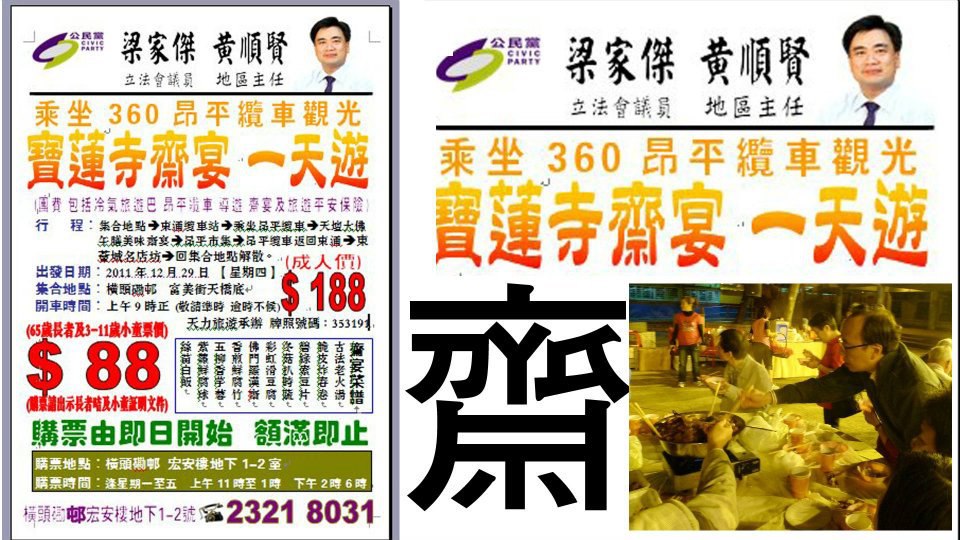
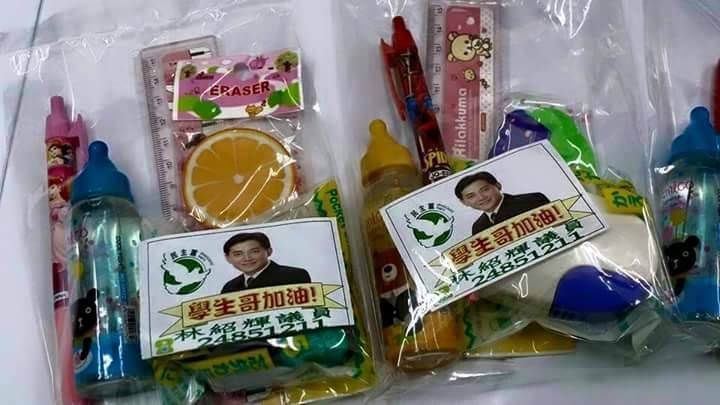
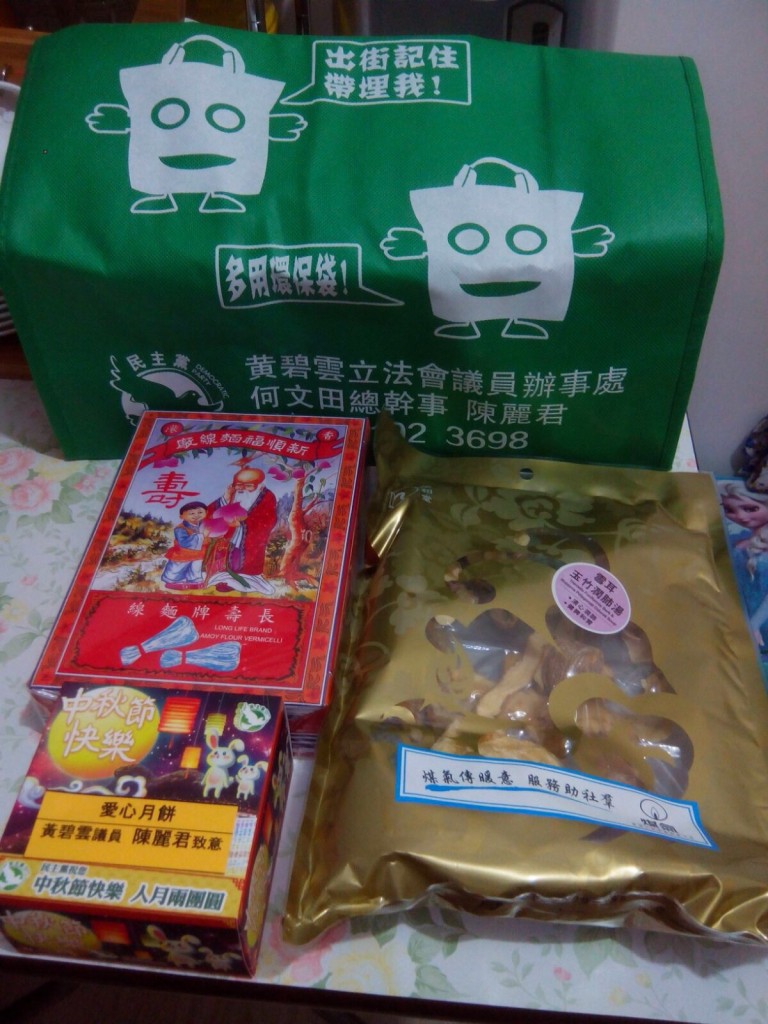
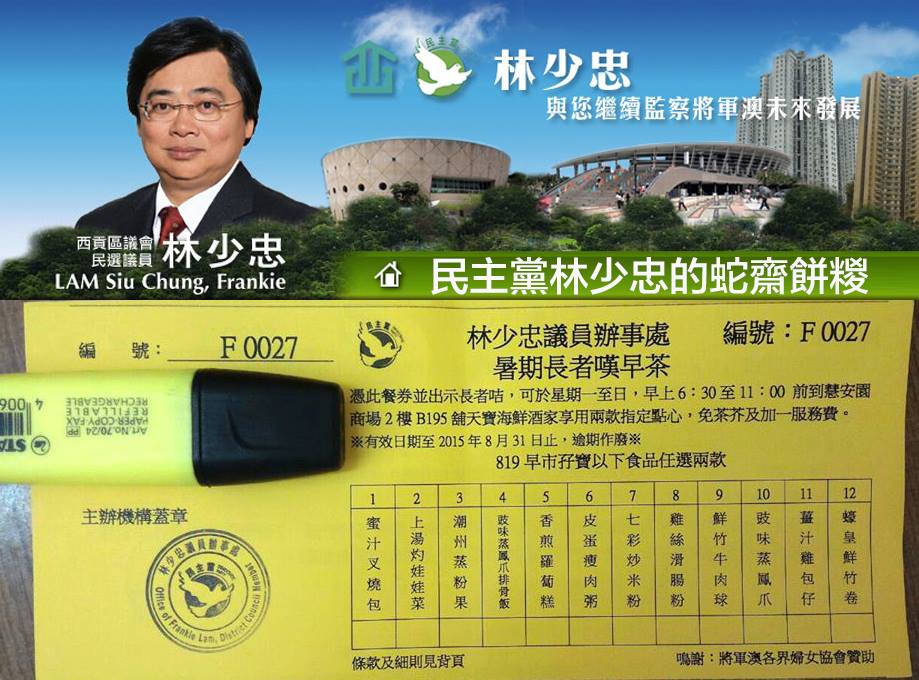
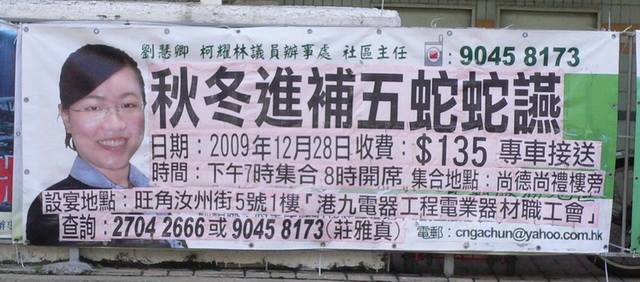
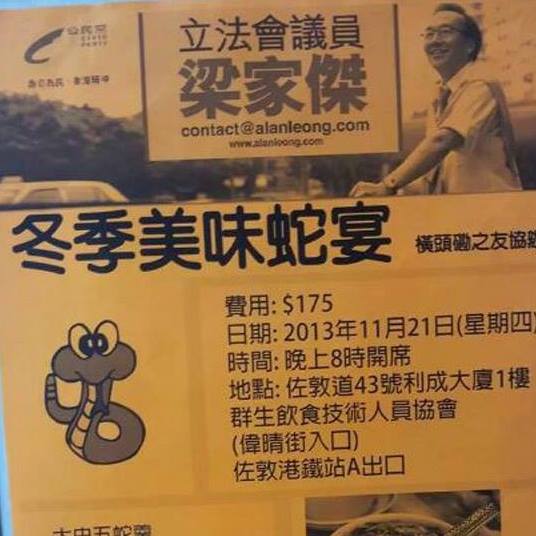
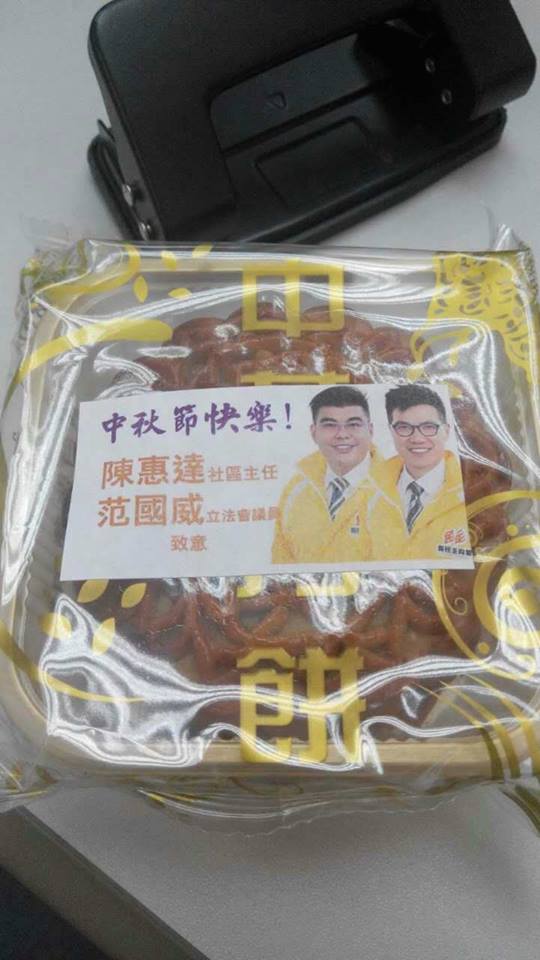
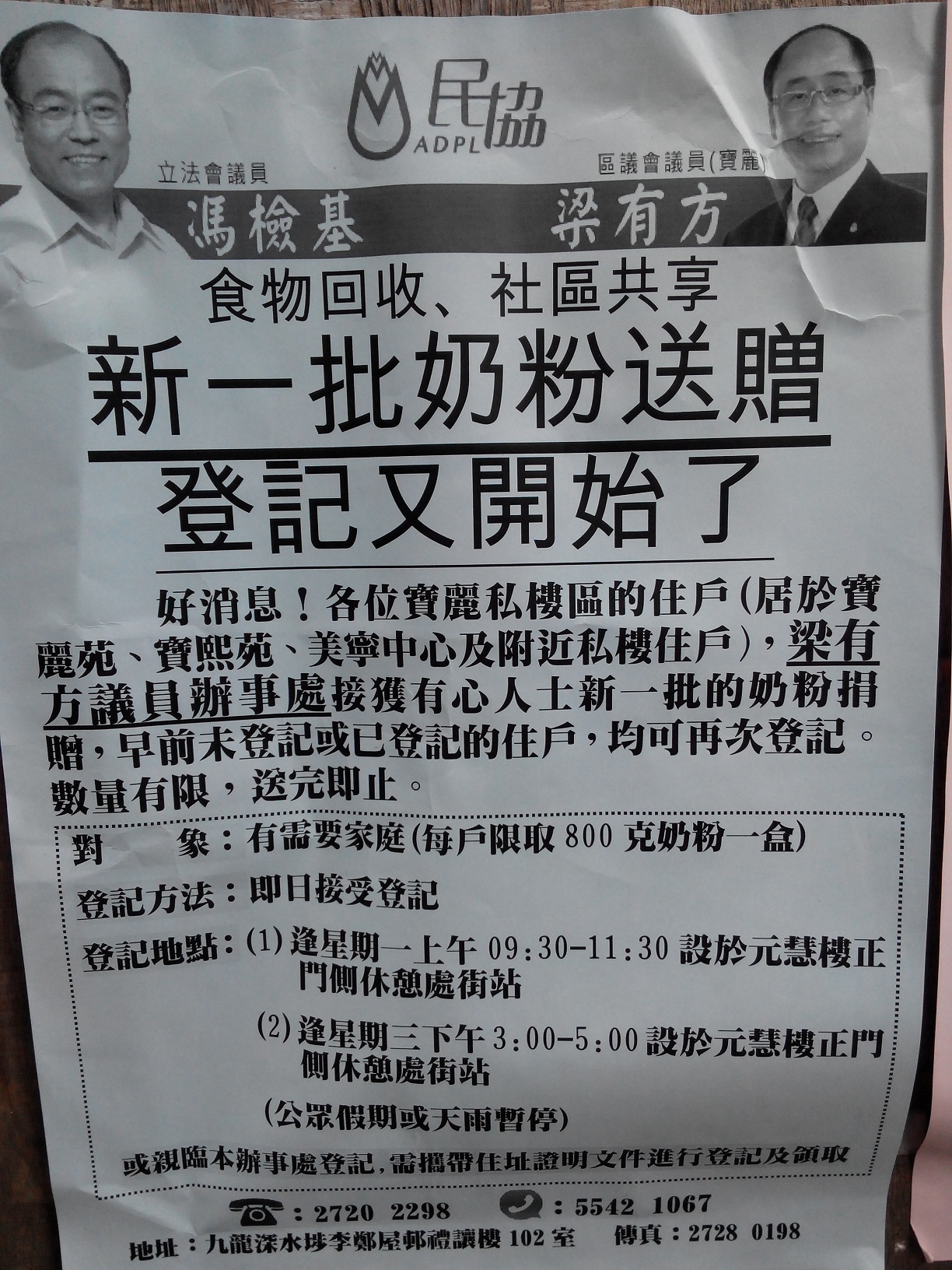
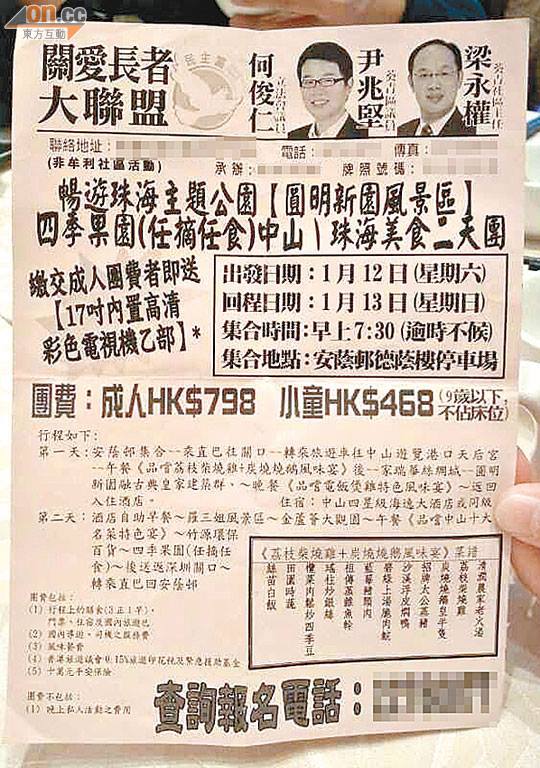
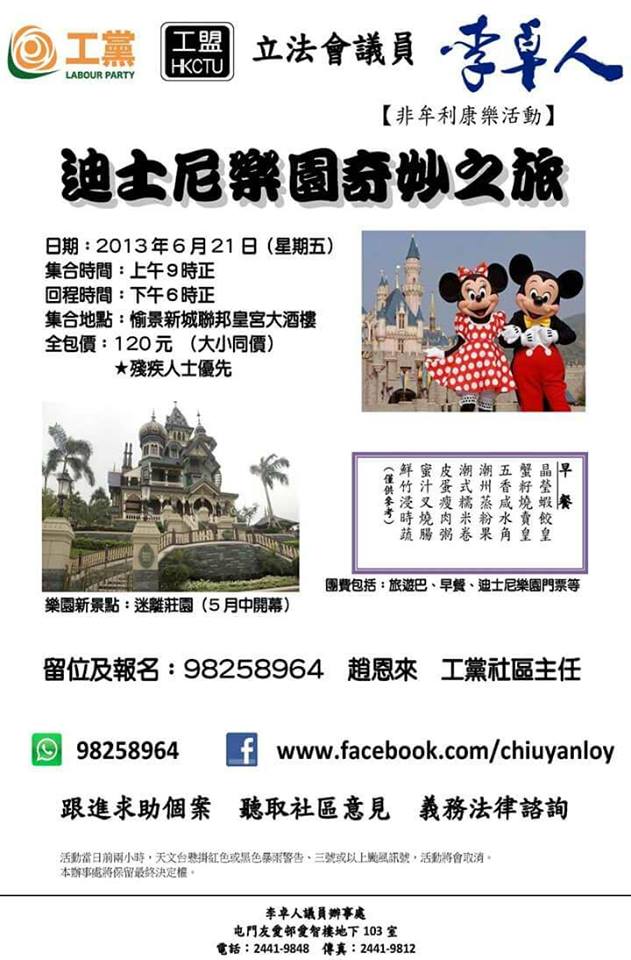
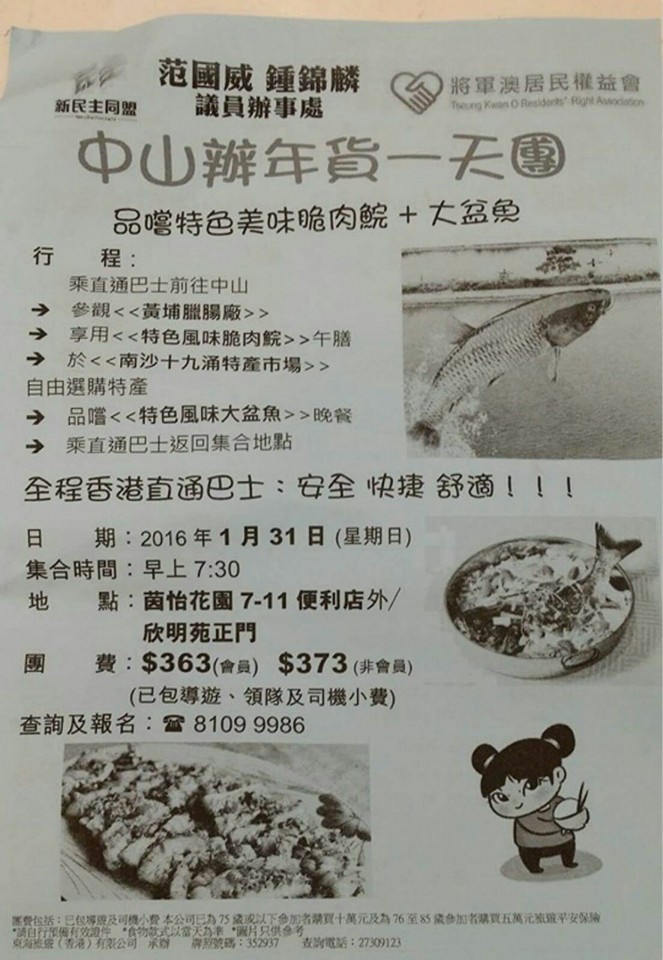
- The Yellow Ribbon mind works this way: If
the Yellow Ribbons do it, it's okay. If the Blue Ribbons do it, it's evil.
When asked to explain the double standards, they will respond with some
combination of FREEDOM DEMOCRACY HUMAN RIGHTS JUSTICE UNIVERSAL SUFFRAGE RULE OF
LAW INTERNATIONAL STANDARDS. This will allow them to enjoy their snake banquets, vegetarian meals,
moon cakes and rice dumplings without any sense of guilt.
- Democratic Party candidate Lam Siu-chung was
in the business of handing out rice packets. Now he is saying that the
election is close and "democracy is in peril." That's because he can't hand
out rice packets during the election period, even as he regrets not handing
out many more rice packets before now.
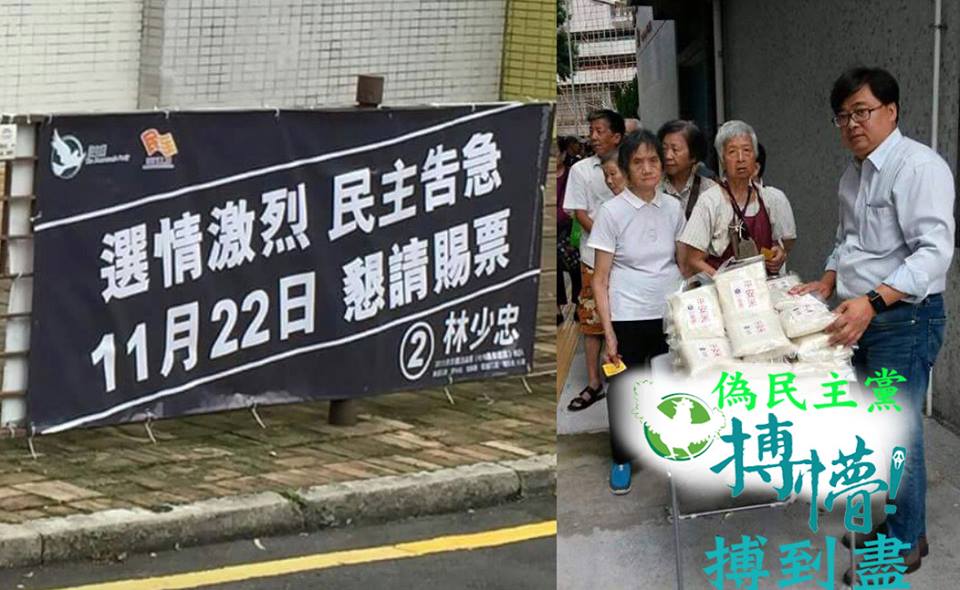
- Volunteers of Louis Wong Yui-tak in the Allway district,
Tsuen Wan are openly telling people to vote for him if they want to have
travel trips.
https://www.youtube.com/watch?v=_bYbrcu1JtY
- The Democratic Party produced this cartoon:
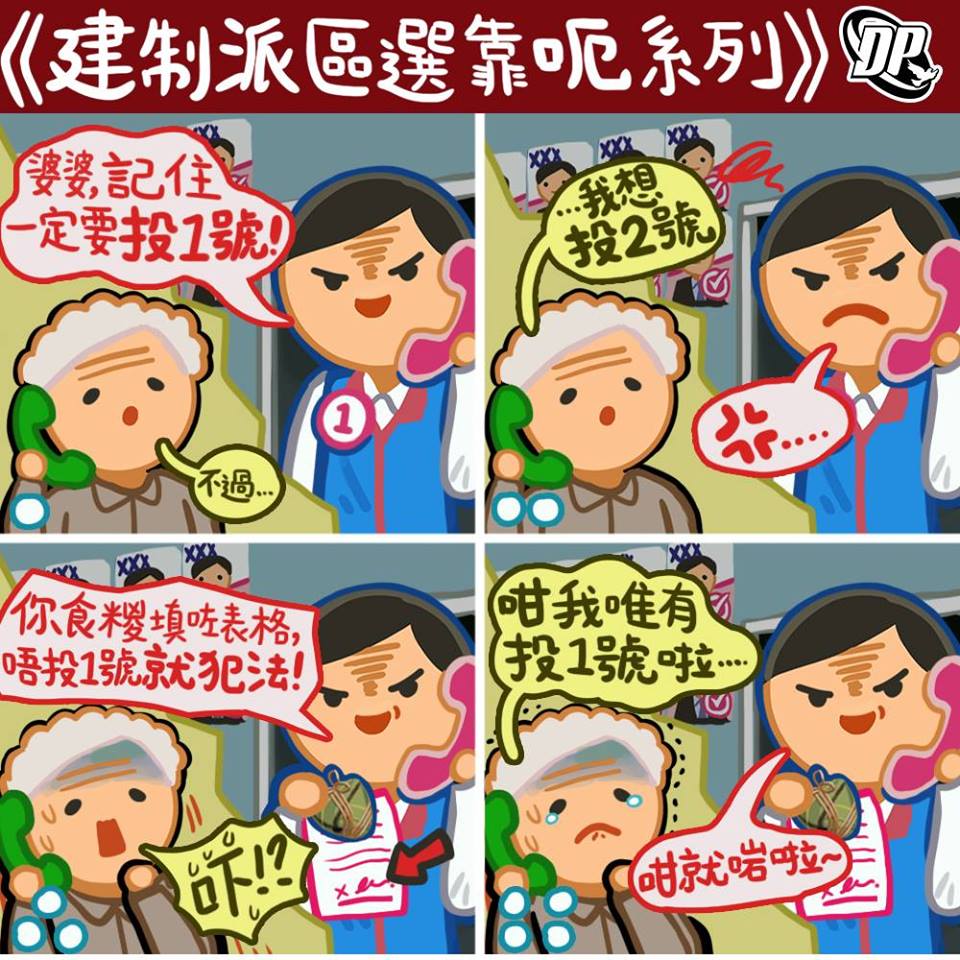
Top left: "Grandma, please remember to vote for candidate #1." "But ..."
Top right: "... I want to vote for candidate #2."
Bottom left: "You filled out a form to get the rice dumplings. You will be
breaking the law if you don't vote for candidate #1." "Huh!?"
Bottom right: "So I'll have to vote for candidate #1." "That would be
right."
For their troubles, the Democratic Party got a
torrent of abuse because they also hand out "snake banquets, vegetarian
dinners, moon cakes and rice dumplings."
Comment: "Really? Why haven't you called the police already? I am afraid
that the police will end up arresting one of your party members. Doesn't the
Democratic Party distribute snake banquets, vegetarian dinners, moon cakes
and rice dumplings? How come I saw your vice-chairman doing that ... and he
still lost."
Response from the Democratic Party: "Every political party distributes the
goodies, but it depends on how they distribute it. We are not like the
pro-establishment camp. We don't bully grandpas and grandmas to vote!"
(Hong
Kong Free Press) October 16, 2015.
Occupy protester and Civic Party
member Ken Tsang Kin-chiu day has been charged with assaulting and obstructing
15 police officers, none of whom are the seven officers who allegedly beat him
last October during the pro-democracy Occupy protests.
Tsang, who is due to appear at the Eastern
MagistratesÆ Court on October 19, was accused of assaulting 11 police
officers by pouring water onto them. Tsang was said to have splashed liquid
onto officers on Lung Wo Road from the embankment of the underpass, after
which he was arrested. He apparently resisted arrest. Tsang was notified of
the charges on Thursday morning and arrived at the police station for arrest
ôby appointmentö on the same day.
Meanwhile, the seven officers who were said to have beaten Tsang up were
also charged with causing grievous bodily harm with intent on Thursday and
have been publicly named. The group, which includes a chief inspector, a
senior inspector and five junior officers, were released on bail after
reporting to the police station. One of the officers, Chan Siu-tan, who was
accused of assaulting Tsang at the police station, was also charged with
common assault.
All of the seven officers will appear in
court on the same day Tsang faces charges against the 15 other officers.
Both incidents took place on October 15, 2014, exactly a year from when they
were charged.
ôI want to say that todayÆs charges and
arrangement are very ridiculousà for a normal charge, the defendant would
receive an allegation based on a police investigation, or brief facts of the
caseà the police has provided neither of these things to me today in
charging me,ö Tsang told RTHK.
Secretary for Justice Rimsky Yuen, however,
said that the decision was made on the advice of a QueenÆs Counsel, whom the
Department of Justice had been consulting with. ôWe believe that the two
cases should be handled in the fairest possible way, and thatÆs why we made
arrangements for Mr Tsang and also the seven police officers to be charged
on the same day, this is todayà it would be beneficial for both of them to
be appearing before the same court on the same day,ö he said. ôI donÆt think
there is any delay,ö he also said, in response to media inquiries on why it
took such a long period of time to charge the seven officers.
Video: TVB news report
https://www.youtube.com/watch?v=AKf4Y9HUjUM
(SCMP)
October 15, 2015.
Seven police officers accused of beating
activist Ken Tsang Kin-chiu during the Occupy protests last year could
face prison after police said all had been jointly charged with wounding or
striking with intent to cause grievous bodily harm. One officer is also
charged with one count of common assault. The charge of shooting or
attempting to shoot, or wounding or striking with intent to do grevious
bodily harm carries a maximum penalty of life imprisonment.
All seven officers have been released on
bail and are due to appear at Eastern Court on Monday. It is understood that
there would be no plea and the prosecution would apply to have the case
transferred to the District Court for trial.
The District Court however can only hand
down jail terms of up to seven years. The prosecution can apply to have a
case heard in a lower court than the High Court - which handles more serious
cases with penalties of more than seven years - if they think it does not
warrant a jail term longer than that. The seven officers reported back to
police this morning after spending almost a year suspended from duties.
Police confirmed their names as Chief
inspector Wong Cho-sing (Organised Crime and Triad Bureau); Senior
inspector Lau Cheuk-ngai, Sergeant Pak Wing-bun, PC Lau Hing-pui, Wong Wai-ho (all Kwun
Tong district); PC Kwan Ka-ho (Kowloon City district); and Chan Siu-tan, a
police constable in the Kowloon East district crime unit, who has also been
charged with common assault.
(SCMP)
October 16, 2015.
A charge of assaulting police filed against
an Occupy protester at the centre of a police brutality case relates to an
incident in which he allegedly splashed liquid on a group of officers, the
Department of Justice said on Thursday night.
The victims of Ken Tsang Kin-chiuÆs alleged
crime were not the seven officers who have been charged with causing
grievous bodily harm with intent in an incident that took place moments
later, the department revealed. Tsang was also handed four charges of
obstructing police who tried to apprehend him after the incident at Lung Wo
Road, Admiralty, in the early hours of October 15 last year.
The department also revealed that a further
charge of common assault against one of the seven officers accused of
attacking Tsang, PC Chan Siu-tan, related to an incident in an interview
room at Central Police Station after TsangÆs arrest. The department released further details of
the case hours after Tsang and the seven were charged a year to the day
after the alleged assaults. All were released on bail to appear before
Eastern Court on Monday.
Dismissing suggestions that charging both
Tsang and the seven on the same day was an attempt to divert the publicÆs
attention, Secretary for Justice Rimsky Yuen Kwok-keung said on Thursday
evening that the alleged offences all happened in a very short time span, so
both cases should be handled simultaneously.
ôThe whole point, if I may emphasise, is to
ensure procedural fairness between Tsang on the one hand, and the seven
police officers on the other,ö Yuen said. Yuen said the arrangement under
which both Tsang and the seven would appear before Eastern Court on Monday
would allow both parties to express their views to the court should there be
any concern. Asked why the Department of Justice had decided to apply for
the case against the officers to be transferred to the District Court, Yuen
said his department considered various factors, including the appropriate
sentence upon conviction and the circumstances of the case.
The District Court can hand out a maximum
sentence of seven years in prison, though the charge of causing grievous
bodily harm with intent carries a maximum sentence of life imprisonment.
(EJinsight)
October 15, 2015.
Tsang,
meanwhile, told reporters Thursday that he received a telephone call from
the police this morning, informing him that he too will have to face a
charge of inflicting harm on police officers. Tsang then visited the Central
police station in the afternoon. Responding to the accusations against him,
Tsang described the charge as ridiculous and untrue, and said he sees it as
a sort of vendetta of the establishment. He pointed out when he was arrested
last year, he had been accused of only things, namely obstructing government
officials, participating in illegal assemblies, and failing to produce
identification. All of those charges were subsequently dropped
by the police. In the charges last year, there was no mention of
inflicting harm on police officers, Tsang noted.
Internet comments:
- For a discussion of the controversy of
the award-winning TVB news report, please see
#028.
- Ken Tsang is saying that the Hong Kong
Police, the Department of Justice and other government officials have
declared war on the people of Hong Kong by charging him with inflicting harm
on police officers. Tsang described the charge as ridiculous and untrue.
Well, Ken Tsang is not being charged with
being the victim of police violence. That is not a crime. The basis for the
charge against him can be seen right here:
https://www.youtube.com/watch?v=WKjtgPFaHCU: NOW News/TVB News had
news videos showing a masked man standing on the edge of a parapet and
pouring unidentified liquid from a plastic bottle onto police officers on
Lung Wo Road below. A man (Ken Tsang) was apprehended and taken away by the
police.
P.S.
https://www.youtube.com/watch?v=1MOzR9aXTwE Cable TV news report,
including the arrest of Ken Tsang
P.S.
https://www.youtube.com/watch?v=8iNf052V2Og in slow motion
P.S.
https://www.youtube.com/watch?v=Roq3t_jk0nU The longer version of
the TVB news report
As Democratic Party legislator James To
pointed out, this incident took place at a location and a time that was
sufficiently removed from the police assault case. So it should be
considered separately. On the basis of these news videos, there is probable
cause for the charge. Ken Tsang can have his day in court. Maybe his lawyer
will argue that it was a case of mistaken identity, or maybe he poured the
water on the police to relieve heat. But that would be during the court
trial.
- Mistaken identity indeed. You can never
trust your lyin' eyes.
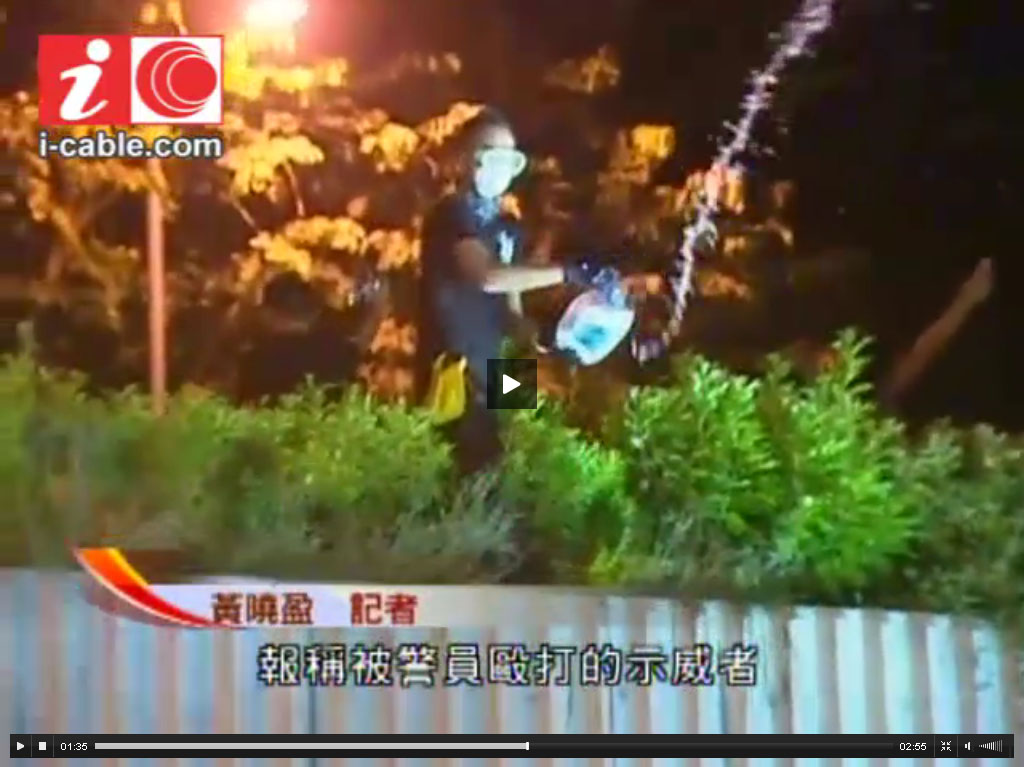
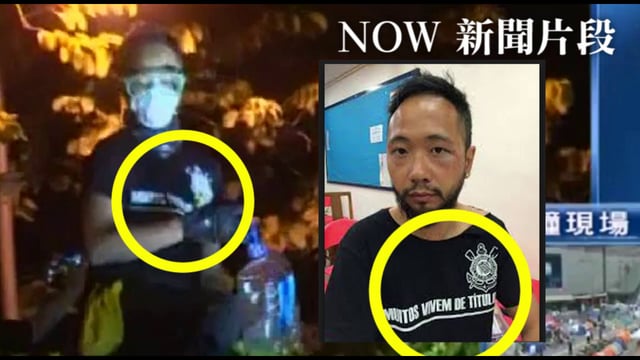
- Ken Tsang will be found guilty and given
the standard sentence of 80 hours of community service.
- Ken Tsang seems to relish speaking to the
press. He has plenty to say except for those things that people are most
interested in. For example, "What was the liquid that you poured onto the
police? Distilled water or urine?" He won't confirm or deny that he was the
masked man in the news videos from TVB, NOW TV and Cable TV. He prefers to
talk about the government's declaration of war on the people of Hong Kong.
This has generated several thousand comments from Internet users who failed
to see the connection between the prosecution of Ken Tsang and any war on the people.
- (Speakout
HK @YouTube) Ken Tsang complained to the press about how the police
arrested him in such a high-profiled manner in consideration of public
relations. Well, who summoned the press there? The Hong Kong Police did not
notify the press that an appointment was made with Ken Tsang for him to come
in
for the arrest. The Department of Justice did not notify the press either.
It was Ken Tsang who summoned the press for a high-profiled conference in
consideration of public relations.
- I know who has declared war on the people
of Hong Kong. It is not CY Leung, or the Department of Justice, or the Hong
Kong Police. It was the Yellow Ribbons who occupied the streets and
prevented the people of Hong Kong from leading their normal lives. They said
that they are protesting against the government, yet they were targeting We the
People without ever affecting the government.
- (HKG
Pao) In his Hong Kong Economic Journal column, Joseph Lian said that
the Hong Kong government succumbed to pressure from the United Nations and
the United States Congress to prosecute the seven policeman. He wrote: "The
business community saw that their interests would be affected if the US
Congress took action, so they forced the government to made the minimal
response." If this were the case, then foreign forces have now interceded
into Hong Kong affairs and destroyed judicial independence. So where are
those senior barristers who like to parade silently in black clothes around
the High Court to protest the death of judicial independence?
Besides, the Hong Kong people can see on
the various news sites just how the American police enforce the law -- they
can shoot unarmed citizens dozens of times; they can attack school children
violently on campus; they can waterboard suspects; etc. Under those
standards, what can the US Congress say about what these seven policemen
did? Wouldn't they be too embarrassed to do so?
- Ken Tsang said that the simultaneity of
his arrest and the arrests of the seven policemen was an act of public
relations. There are two other ways to proceed.
Firstly, Ken Tsang is prosecuted first
before a decision is made on the seven policemen. Tsang's case is easy given
the video of him throwing an unidentified liquid onto police officers. The
video and the testimonies of the eleven arresting officers are sufficient to
proceed. If that were to happen, Ken Tsang would cry foul! He would divert
attention on his own case by asking why the seven policemen weren't charged
yet. The Civic Party would demand the United Nations Human Rights
Commissioner, the US Congress and the British Parliament intercede and
impose economic sanctions on Hong Kong. That would be an act of public
relations, with most of the discussion centered on Ken Tsang being clearly
guilty and so why shouldn't he be prosecuted?
Alternately, the seven policemen are
charged but Ken Tsang is not. The television shows would be showing the
videos of both Ken Tsang throwing the liquid and the beating in the dark
corner. Enraged citizens would demand to know why Ken Tsang hasn't been
charged yet. Most of the discussion would be centered on Ken Tsang being clearly
guilty and so why hasn't he been prosecuted yet?
Either way, Ken Tsang is not going to be
able to avoid facing up to his own culpability.
- Ken Tsang is charged with assaulting 11
police officers. This led people to say that Ken Tsang must be even more
powerful than
Ip Mon
who challenged ten Japanese karate experts together. Well, let me
remind you that the
Mong
Kok acid thrower Part 2,
Mong
Kok acid thrower Part 3 once injured 24 persons by tossing corrosive liquid
from above.
(EJinsight)
October 13, 2015.
ItÆs
not for nothing that Joshua Wong wants the age limit lowered for candidates
for public office. When
he launched a legal challenge on Monday to slash the minimum age requirement
to 18 from 21, it came with more than a hint of his intention to run for the
Legislative Council next year.
Wong,
who rose to prominence during last yearÆs democracy protests, turned 19 on
Tuesday, not too young to vote but not old enough to be voted on until at
least 2017. As a
student leader of the protest movement, Wong no doubt was one of the best of
the class of 2014. He proved his mettle opposite top government officials
and with fellow students, but does he have what it takes to prosecute his
advocacy from the other side? Some people are asking because his petition
for a judicial review is creating a buzz.
Never
mind that it is only the first step in a complex legal and procedural
process whose chances of success are at best uneven in the present political
environment. But what Wong has done is bring attention to an election regime
that has allowed the pro-democracy and pro-establishment camps to dictate
Hong Kong politics since the first post-handover Legco elections in 1998.
Wong
came of age during the protest movement, along with a welter of student
leaders and young people who saw an opportunity to influence local politics
beyond exercising their right to vote. He wants people old enough to vote to
be old enough to run for public office. The
idea is to encourage more young people to engage in the reshaping of the
political landscape when they have the most at stake in Hong KongÆs future.
Wong
knows he cannot be a student leader all his life. Which is why he is willing
to trade his moral halo for a politicianÆs hat and get into the cut and
thrust of a completely different arena. If that happens, he would be an
interesting case study.
Most
young Hong Kong people are not interested in politics, despite their
exposure to its street version last year. Also, they see no incentive in an
unrepresentative election framework dominated by functional
constituencies. They donÆt think such an arrangement allows their voice to
be heard.
ThatÆs
where Wong disagrees. In his mind, those voices should not be left in the
streets and should be brought to bear on political issues in an elective
forum.
Wong
obviously believes that reform of the political system is best fought from
within. Already, he is putting veteran politicians on notice about his
intentions, so itÆs no surprise that establishment figures are giving his
plans the cold treatment.
Acting
Chief Executive Carrie Lam is adamant the public has no appetite to overhaul
the election age requirement anytime soon.
Stay
tuned.
(SCMP)
October 13, 2015.
Student activist Joshua Wong Chi-fung is
launching a court battle to fight a minimum age of 21 for people seeking a
seat in the city's legislature - and says he could run for a Legislative
Council seat next year if he wins.
Wong, who turns 19 today, yesterday filed a
judicial review application to the High Court challenging the rule, arguing
that most other jurisdictions - including the mainland - allow people to
seek office at 18.
"It is ironic that people can stand for
election to the Standing Committee of the National People's Congress [at]
just 18 years old," he said outside court. "It is really unreasonable that
the age limit for contesting the Hong Kong Legislative Council election is
21 years old."
Wong, convenor of student group Scholarism,
has built an international reputation since leading a successful fight
against national education in schools, and was a key figure in last year's
Occupy protests. He said he would consider running in next year's poll if he
won.
"After the 'umbrella movement', we hope to
encourage more young people to bring their ideas, such as
self-determination, and future problems in Hong Kong from the streets to
Legco," he said. "That's why I am applying for this judicial review; I hope
to achieve a breakthrough in the current system."
Wong said he had discussed the case with
fellow Scholarism members but had made the application alone. He intends to
seek legal aid.
In his writ, Wong says the minimum age of
21, as set down in the Legislative Council Ordinance, is "unconstitutional".
He points to Article 26 of the Basic Law, under which all Hong Kong
residents have the right to vote and the right to stand for election in
accordance with the law. Wong says this constitutes unequal treatment of
people aged between 18 and 20.
He names many countries, including Britain,
Canada, Denmark, Finland and Germany, which set the minimum age for both
voters and candidates at 18. Only Singapore sets the minimum age for both
voters and candidates at 21. He says 18 is also the minimum age for the
national and local people's congresses of the People's Republic of China.
"It is far from apparent that there is a
need to set the minimum age for candidacy at [a] higher age than the minimum
age for voting," the writ says. "Conversely, there is good reason for the
minimum age for candidacy to be the same as the minimum age for voting. The
natural and logical assumption must be that a person who is deemed mature
enough to vote à would also be sufficiently mature to stand for election."
Wong states that, as a potential
candidate, he was directly affected by the requirement. He therefore asked the
court to let him challenge it.
(SCMP)
October 13, 2015.
Hongkongers have not indicated a strong
desire in public discourse to lower the minimum age for Legislative Council
election candidates, acting chief executive Carrie Lam Cheng Yuet-ngor says.
Lam was responding to a judicial review application filed by student
activist Joshua Wong Chi-fung to challenge a rule in election laws requiring
people contesting Legco seats to be aged at least 21.
Wong wants the High Court to lower the
minimum age to 18 û the same as for the national and local peopleÆs
congresses of the PeopleÆs Republic of China.
Lam said ahead of an Executive Council
meeting today: ôIn the process of taking Hong Kong forward in democratic
development, and in discussions with the Legislative Council and the public
on electoral arrangements, we have not come across a very strong desire to
lower the age from 21 to 18.ö Even if a strong desire for such a change
emerged now, she said, any amendments to election laws were unlikely to
happen in time for the Legco election next year. ôIt appears time is very
tight,ö she said.
(Kinliu.hk)
By Chris Wat Wing-yin. October 15, 2015.
A few days ago, Joshua Wong said on radio
that "today's parliamentary politics is the politics of old people." Wong
probably does not know much about history, because politics has always been
an adult affair. Those who lack knowledge and experience have no place in
politics.
The people of Hong Kong are familiar with
Margaret Thatcher, who served as Prime Minister until she was 65 years old.
Americans love Ronald Reagan, who began campaigning for president when he
was 69 years old. So by any international standards that you care to raise,
politics is the politics of old people. Wong is 19 years old and he already
wants to get on the politics platform. He thinks that all he has to do is
get a microphone, say something and get some applause, and that would be
success, glamour and genius. With due respect, that is a trap that you will
be sorry about when you look back eventually.
After the Umbrella Riots, some bleeding
hearts suggest that the social destroyer Joshua Wong should go back to
school, read more books and learn to be humble. But it would seem that those
words have fallen on deaf ears. Instead our bad boy has antagonized his
fellow travelers and angered the bankroller. By talking about "old people's
politics," he has offended everyone in the Legislative Council? With one
fell swoop, he has dismissed everything that they did over the past several
decades. Wong says that he has difficulty finding allies in the Legislative
Council. He talks big, but it is had to see what kind of allies he is
looking for.
I wonder why nobody would give him a
straight talk. For his own good, his parents and friends should say
something. Being 19 is the best age to learn humbly, not to be unbearably
arrogant.
When Joshua Wong went down to the
courthouse to hand in the judicial writ, he took a taxi. When the taxi
arrived at the destination, he hopped off and started walking ahead. The
driver yelled: "You haven't paid yet!" This small act showed that a child
who has never needed to pay the pay don't even know that you have to count
your money before you get off. You can pay off the taxi fare eventually, but
when you ever pay back the debt known as Occupy Central?
A child who has never earned money, a boy
who has never been to class, a citizen who has never paid taxes, a student
who is in school because of taxpayer subsidies, a dependent who does not
even know how to pay the bill ... he who has never known about hardships now
want to rule the world. Will we let people like him get away with it?
(Wen
Wei Po) October 15, 2015.
Recently Scholarism convener Joshua Wong
applied for a judicial writ to the High Court to reduce the age requirement
for Legislative Councilor to 18 years old. He said that if he wins, he will
enter the Legislative Council elections next year, because "there is a
serious problem with old man politics in the legislative council" and
"talents" such as himself are needed. Although Joshua Wong's family is
well-off and live in a middle-class housing estate, he applied for legal
aid. If as expected, legal aid is approved in all matters of a political
nature, then Joshua Wong will be able to enter the elections without
spending a cent of his own money.
But Joshua Wong might have overreached with
his greediness. Why was he able to rise up so quickly in recent years?
That's because he has a "moral aura" due to his student status. Some
citizens think that he is a student with no ulterior political motives. But
now he wants an unnecessary judicial review so that he can get a job that
pays more than $100,000 a month. Such selfishness won't be acceptable. Oddly
enough, the fiercest criticisms are coming not from the pro-establishment
camp. Instead, he is coming from the pro-democracy camp, especially from
Civic Party chief Alan Leong. In an essay, Alan Leong said that Wong will
lose his aura if he enters the elections for legislative council. Leong also
lectured Wong on respecting the pan-democrats and not dismiss their efforts
over the past two or three decades as "old man politics."
Is Alan Leong right? He is very right. By
his action, Joshua Wong has ripped aside his mask and showed that "the young
hero of democracy" is just another "greedy political hack" who only looks
after his personal interests. As for "old man politics," the fact is that
all those legislators were elected by voters and therefore what they do is
what the voters want. There is no reason why the Legislative Council should
be filled with "red guards" like Joshua Wong who lack both
knowledge and ethics.
Of course, Alan Leong is launching a public
attack not for the sake of justice. He is just worried about the upcoming
Legco elections. If Joshua Wong wins the judicial review, other Scholarism
members will enter the elections as well. This will put pressure on the
Civic Party. If Alan Leong really wants to retire from his Kowloon East
seat, Joshua Wong might run there. Scholarism is not going to be able to
steal the votes delivered by the Democratic Party precinct captains, but
they sure can steal some of the "celebrity" and "concept" votes of the Civic
Party. If Joshua Wong runs, he won't affect the Democratic Party much. But
he will affect the Civic Party and other radical parties such as People
Power and League of Social Democrats.
Alan Leong knows what is on Joshua Wong's
mind. After the Occupy episode, they know that these "red guards" don't
respect them and will do whatever they want without any mediations. This
will put the Civic Party in an embarrassing position. Therefore, Alan Leong
had no choice but to pick on Joshua Wong for saying "old man politics." Alan
Leong's best hope is for the judicial review to fail. But if Joshua Wong wins,
Leong must need to knock the sheen off the Scholarism auara. As Leong wrote, "I
want to give Joshua some advice. When you get into politics, there are many
temptations and trials that will bring out the best and the worst of you."
Right now Alan Leong is showing us the worst of Joshua Wong. When it comes
to Legco seats, the Civic Party will not let up on Joshua Wong. Even the
financier will probably step in to teach Joshua Wong a lesson. It will be
interesting to see how long Joshua Wong's aura can last.
(The
Sun) October 15, 2015.
The Yellow Guards said that "old man
politics" is a serious problem at the Legislative Council and they want to
bring in the voices of the young generation. Thus, they are gunning right
for the old pan-democratic farts by stealing their voter base. This is the
usual ghoul-versus-ghoul fight. The Yellow Guards said very bluntly that
many of the pan-democrats hang on until they are fifty something years old
only to keep their Legco seats. In recent social movements, these old farts
incite young people to charge the front lines while their own children sit
home to watch television or study overseas without breaking the law. But the
old farts are too smart for themselves, and the young turks find themselves having to
pay the price.
The old farts are able to enjoy themselves
for decades by just saying "democracy". The Yellow Guards have now gained
fame and therefore they want to reap the fruits of their revolution. Nothing
is more attractive than a Legco seat.
In truth, the Hong Kong legislative
councilor is a great job -- it pays a lot and the workload is very light.
There is nothing better than this job in the world. Don't you see the
legislators clipping their fingernails, or browsing sexy girlie photos, or
napping, or not even showing up while still collecting their monthly salary
of $90,000+? Of course, they will use up most of their $2 million+ annual
expense allowance. Whenever a senior government official comes in for a Q&A
session, they will
routinely yell some slogans, toss some objects, get expelled from the
chamber and show up
on television news.
When the Chinese rebel, they always say
that they are trying to fight for justice. But all they want to do is to sit
on the emperor's throne themselves. The Yellow Guards may have started out
with some pure ideals. But in the end, they only want the benefits of
officialdom. Congratulations! The Yellow Guards are coming of age!
Internet comments:
- Joshua Wong's group Scholarism has a war
chest of hundreds of thousand of dollars, but of course he won't use up the
money for this judicial review. Instead he will apply for legal aid as a
indigent student with no income, so that
We the People will pay for it. Of course, this is being done for our good.
Of course.
- At first, Joshua Wong posted on Facebook said that he would pay his own
way although he just may apply for legal aid. This drew a lot of complaints
about spending the blood-and-sweat money of the taxpayers. One day later, Wong
went ahead to apply for legal aid and posted a queue ticket on his Facebook
to rub it in.
This goes to show that Wong doesn't give a rat's ass about what the public
thinks.
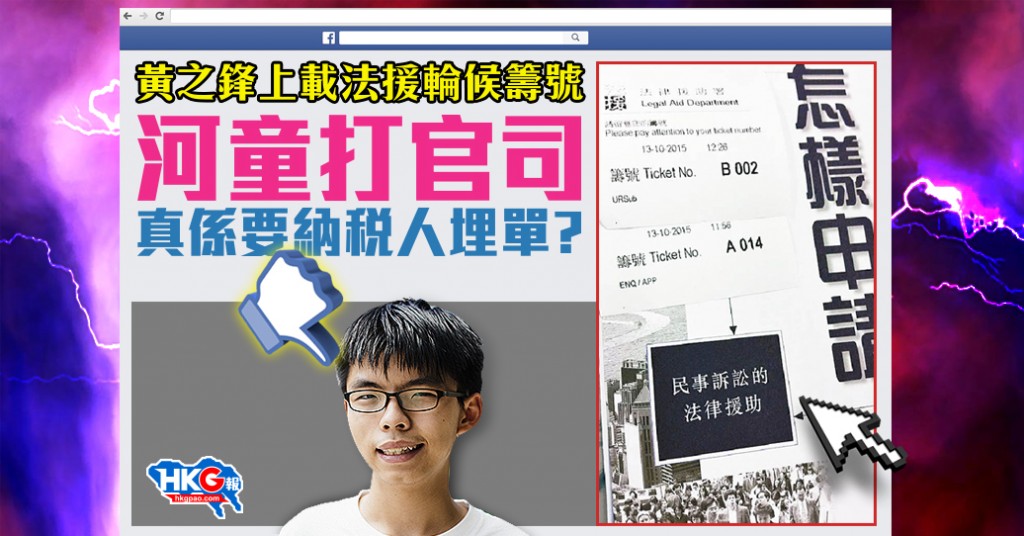
- (Oriental
Daily) October 12, 2015.
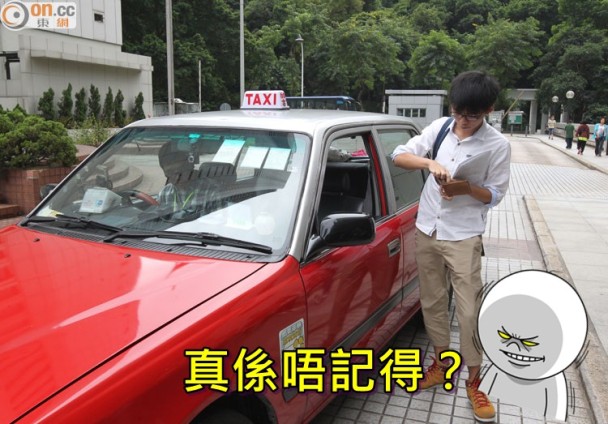
Did he really forget?
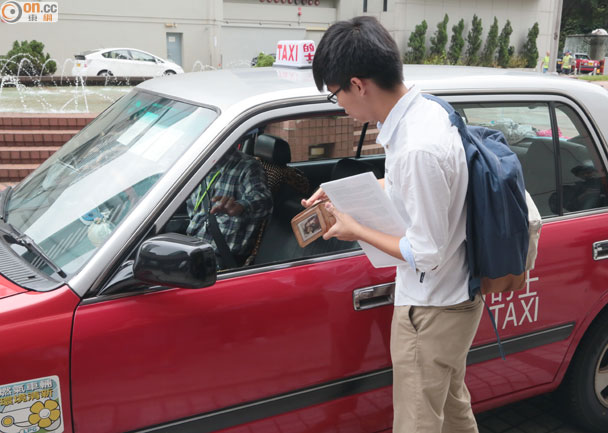
When Joshua Wong's taxi arrived at the
High Court, he got out of the car and started to walk. The taxi driver yelled aloud: "You
haven't paid yet!" Wong returned to pay the fare. Afterwards, Wong said
that the taxi fare was around $80. When our reporter asked him where he
came from, Wong got aggressive and said that he does not need to account
for his personal details. He characterized our reporter's question as
stupid. According to information, Joshua Wong lives in Southern Horizons, Ap Lei Chau. So it is likely that Wong took at taxi from there to here.
This is not the first time that Joshua Wong
forgot the social rules and norms (see, for example,
#261). When he
does not care about obeying laws, why bother with legislating laws?
- Why does he take taxis? Because he is liable to be attacked by citizens in
public area (see, for example, #323).
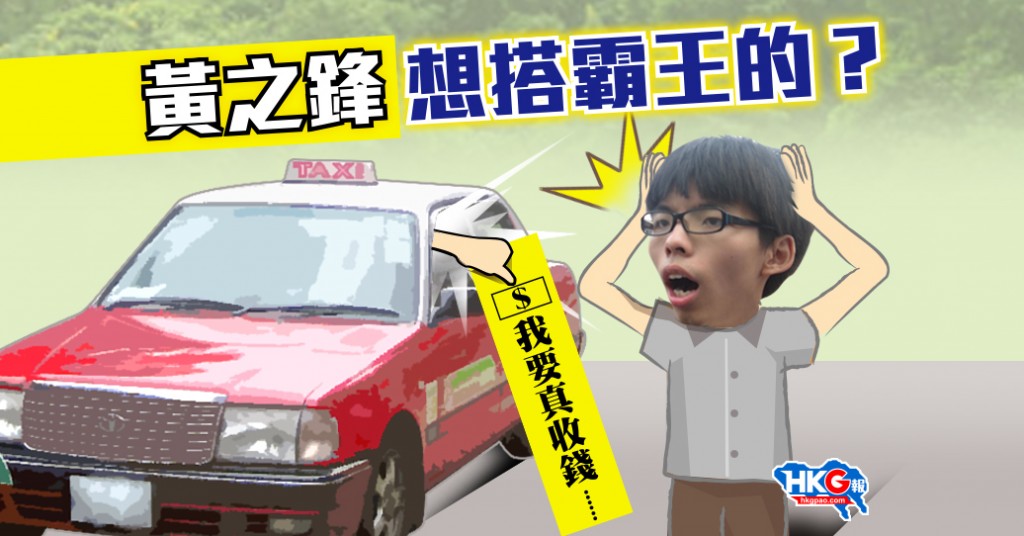
Taxi driver: "$ - I want genuine taxi fare
payment!"
- "He names many countries, including
Britain, Canada, Denmark, Finland and Germany, which set the minimum age for
both voters and candidates at 18. Only Singapore sets the minimum age for
both voters and candidates at 21."
When someone produces a list like this, you
should be immediately suspicious about the omissions. What is so special
about Denmark and Finland that Wong ignored much larger democracies such as
the United States of America, Australia, France, India, etc? Would an
all-star cast of United States, Britain, France, Germany, Russia, China,
Japan, Australia, Canada, etc be more convincing?
Let's look at the most glaring omission:
The United States of America.
(US
presidential eligibility)
Article Two, Section 1 of the United
States Constitution sets forth the eligibility requirements for serving
as President of the United States:
No person except a natural born
Citizen, or a Citizen of the United States, at the time of the
Adoption of this Constitution, shall be eligible to the Office of
President; neither shall any person be eligible to that Office who
shall not have attained to the Age of thirty five Years, and been
fourteen Years a Resident within the United States.
(US
Senate eligibility)
Article I, Section 3 of the
Constitution sets three qualifications for senators: 1) they must be at
least 30 years old, 2) they must have been citizens of the United States
for at least the past 9 years, and 3) they must be inhabitants of the
states they seek to represent at the time of their election.
(US
House of Representatives eligibility)
Article I, Section 2 of the
Constitution sets three qualifications for representatives. Each
representative must: (1) be at least twenty-five years old; (2) have
been a citizen of the United States for the past seven years; and (3) be
(at the time of the election) an inhabitant of the state they represent.
Members are not required to live in the district they represent, but
they traditionally do.
Joshua Wong cannot use the United
States to support his case.
- "He says 18 is also the minimum age for
the national and local people's congresses of the People's Republic of
China." "Wong wants the High Court to lower the minimum age to 18 û the same
as for the national and local peopleÆs congresses of the PeopleÆs Republic
of China." What are the facts?
(NPC.gov.cn)
All citizens of the People's Republic of
China who have reached the age of 18 have the right to vote and stand for
election, regardless of ethnic background, race, sex, occupation, family
background, religious belief, education level, property status or length
of residence. People who have been deprived of their political rights
according to law do not have the right to vote and stand for election.
So far so good on the age requirement. But
here is what happens next.
(NPC.gov.cn)
Deputies to the people's congresses of
cities not divided into districts, municipal districts, counties,
autonomous counties, townships, ethnic minority townships and towns are
elected directly by their constituencies. Deputies to the NPC and the
people's congresses of the provinces, autonomous regions, municipalities
directly under the Central Government, cities divided into districts, and
autonomous prefectures are elected by the people's congresses at the next
lower level.
In Hong Kong, the Legislative Council is
divided into five geographical constituencies which are divided into
hundreds of smaller districts each with several thousand voters. So if you
follow the NPC method, you can only have direct election of district
councilors who will indirectly elect the legislative councilors.
Somehow I don't think that this is the
system that Joshua Wong wants, given that each and every of the 18 district councils
is
dominated by pro-establishment councilors. He is just cherry-picking what he
wants to have.
P.S. The youngest ever National People's
Congress Standing Committee member was 38 years old.
- (Ming
Pao) October 17, 2015. Former legislator Allen Lee said that Joshua
Wong's demand is a selfish act because he wants to find a new platform for
his social activism. He called on Joshua Wong to withdraw his judicial writ.
In response Wong said that he did so because he felt that the election
system was unfair. The courts and the citizens are the ones who will decided
whether he can bring his ideas into the Legislative Council. Wong has no
intention of withdrawing his application because of the criticisms of one or
two persons.
- (HKG
Pao)
Early last year, I said that once Joshua
Wong leaves secondary school, his political influence will tumble down.
Once away from secondary school, can he influence secondary school
students anymore? Will the current students listen to him? Or will they
start their own thing?
The tertiary schools have their own
turfdoms. Joshua Wong's grades are not good enough to get him into the
eight universities. Why would the university students listen to an
outsider?
Outside the schools, what is left is
Joshua Wong's so-called old-man politics with fierce internecine
struggles. Since he does not have a group of precinct captains to work the
local districts, he won't have much influence. By the time that he reaches
21 years old, his celebrity status will be spent. Therefore, he has no
choice but to file the judicial writ to obtain a Legco seat as soon as
possible.
This is the reason for Joshua Wong's
action: Time is not on his side. The same thing happens to all the child
stars in the movie industry. If he cannot enter the 2016 Legco elections, he
will probably leave Hong Kong and continue to be an overseas pro-democracy
activist in America.
- (HKG
Pao)
In order to mobilize public support,
Joshua Wong changed his Facebook to say "Charging into the Legislative
Council with generational reforms, judicial review on election age
eligibility" with a large number "18". He must have thought that this
would bring him a lot of LIKE's but his fans had some surprising
reactions.
- Why are you doing such pointless things
to waste taxpayers' money? I have supported you before, I even donated
money to you. Ever since the Umbrella Movement, your immature comments
have disappointed me. This shows that an 18-year-old is unqualified to
become a Legislative Council! I will UNLIKE you from now on.
- Was the law designed for your sake?
Will the law be changed for your sake?
- I support you to seek a judicial review
of the Basic Law. It should be completely written by you ... but first you
have to sue your parents first for giving birth to you without your
consent.
- Actually, it makes no difference
whether the eligible age is 18 or 21. Under these circumstances, who is
going to vote for the River Child?
- There is no problem with you seeking a
judicial review. But please use your own money. Do not use Legal Aid. That
is a waste. If you can't even solve the "XX does not represent me"
problem, how can you get into politics? Isn't this going to be a waste?
(Note: "XX does not represent me" refers to the fact that there was no
leadership during the Umbrella Revolution).
- But 18 would not meet international
standards. In the United States, you have to be 25 years old in order to
run for Congress.
- What is the problem with waiting until
you are 21? Are you afraid that three years later, those people who
support you now will see that everything you do is to pave your way to
become a political hack?
- You did so many things just so you can
earn the $90,000 monthly salary as Legislative Councilor? I am
disappointed in you.
- The current minimum age for Legislative
Council candidate is 21. Are there any Legislative Councilors 21 years
old? None. 22? 23? 24? 25? ... According to
Wikipedia, the youngest Legislative Councilor is 36 years old
(born in 1979). Why not younger? Because a 21-year-old won't have the
knowledge and experience to handle the job. Will an 18-year-old do better?
That is a rhetorical question.
- Joshua Wong is immensely popular with
the citizens (and the western media). Here is a photo posted on his own
Facebook of himself handing out voter registration forms to enthusiastic
citizens in Wanchai. He counting on them to vote for him in the
Legislative Council election.
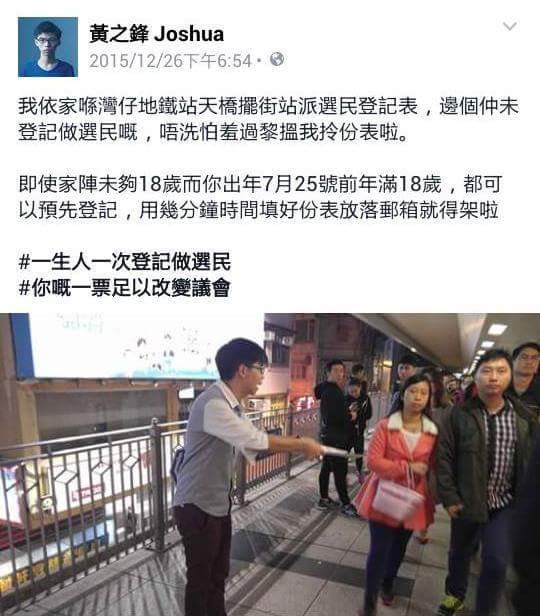
(Ming
Pao) October 12, 2015.
The Hong Kong Federation of
Students and the student unions at the 8 universities planned to hold a
student referendum in February 2016 on a number of issues: (1) the elimination
of having the Chief Executive become the chancellor automatically; (2)
increasing the ratio of insiders (students, teachers and staff) on the board
of directors and university council; (3) increasing the number of students on
the university council; etc. According to Hong Kong Federation of Students
deputy secretary-general Wong Hon-leung, the current chancellor CY Leung has
been violently interfering with internal affairs within the universities. Wong
said: If the Chief Executive is not elected by one-person-one-vote, "On what
basis can he represent the people of Hong Kong to supervise the universities?"
Wong Hon-leung said that there was a
historical reason why the Chief Executive is automatically the university
chancellor, but that was when the British colonial governor never intervened
with internal affairs at the universities. Wong agreed that external members are
important for the board/council, but he said that this does not mean that
the Chief Executive to appoint his people. There are instances in which the
chancellor is elected by the alumni on a one-person-one-vote basis.
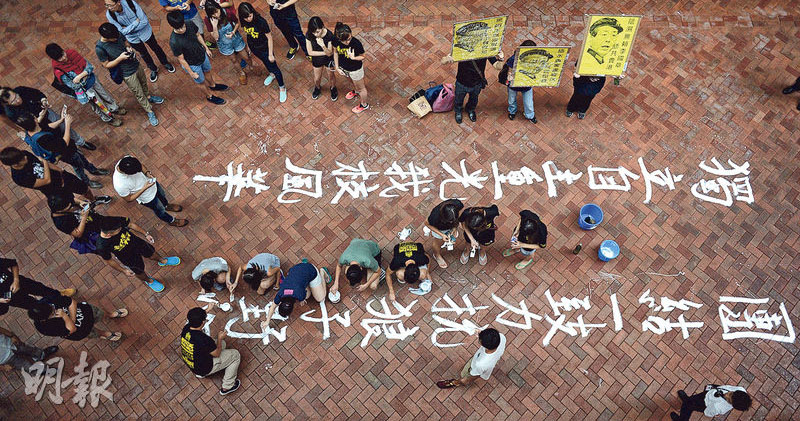
Independent self-determination to reclaim the
glory of our school
Unite as one to resist the ambitious wolf
(SCMP)
October 12, 2015.
Referendums will be held at eight local
universities as student activists seek to amend the laws that make the
city's chief executive the chancellor of their universities and allow him to
appoint his allies to the institutions' governing bodies.
The plebiscites would follow a
controversial decision last month by the University of Hong Kong's council
to reject liberal scholar Professor Johannes Chan Man-mun's candidacy for a
key managerial post. The vote sparked public outcry over the university's
autonomy. Fears were revived last week after Chief Executive Leung Chun-ying
appointed Beijing loyalists to Lingnan University's council.
"The government has turned the
universities' councils into its own 'back garden' via personnel
appointments," said Alan Wong Ka-fai, a deputy secretary general of the
Federation of Students, which is coordinating the upcoming polls. "[The
councils] have become a place to distribute political rewards à and conduct
political retaliation." The university ordinances stipulate that
the chief executive is chancellor of all public universities and authorise
him to appoint council members.
The referendums, which are to be carried
out separately by the eight universities' student unions before next
February, will seek students' opinions on the need and means to amend the
ordinances, including the possibility of removing the chief executive as
chancellor and increasing the proportion of student and staff
representatives on governing bodies. Wong said the student unions would urge
their institutions to set up a committee to work on the amendments if a
majority of students backed the motion. He added that polls would
consolidate students' voices and build a basis for further protests.
This month, Baptist University student
representatives will meet university president Professor Roland Chin Tai-hong
to raise the plan. Student unions of the University of Hong Kong,
Polytechnic University and Baptist University this year disaffiliated from
the federation following the Occupy sit-ins last year, but they have teamed
up to push the polls. Wong explained: "The crisis we are facing now affects
not just one school but every institution, student and staff. What happened
made us more united."
City University, which also left the
federation, was the only public university not to join the referendum plan.
Its student union was disbanded last month.
(Hong
Kong Free Press) October 13, 2015
Chief Executive Leung Chun-ying stated on
Tuesday that the Chief Executive has certain responsibilities in Hong KongÆs
government-funded universities. The statement was made at the airport before
LeungÆs departure to the UK and Israel for an official visit.
Leung said that the extent of his
involvement and responsibilities, as well as that of the institutionÆs
management and staff, varies according to the legislation of the respective
tertiary institutions. As head of government, he said, he must act according
to his responsibilities under the ordinances that form these universities.
He further added that the views of staff and students on potential
amendments to the governing structure of these institutions would be
considered.
The Chief Executive automatically serves as
the chancellor to all of Hong KongÆs tertiary institutions, a role that is
traditionally only symbolic.
(SCMP)
Wish for end to chief executive's role at universities could be a slippery
slope Hong Kong can't handle. Alex Lo. October 22, 2015.
Student activists want to end the practice
of the chief executive automatically becoming the chancellor of our publicly
funded universities to defend their autonomy and academic freedom. In
principle, they are right. In practice, it is almost impossible to do.
Moreover, they should be careful what they wish for. Radical as it is, they
may not know they are threatening the whole governance structure of Hong
Kong.
Our system of government is not described
as being "executive-led" for nothing. Practically all the heads of public
bodies and most if not all of their board members are appointed, either
directly or indirectly, by the chief executive. Among these are the
commissions on tourism, competition, law reform, women and the elderly,
equal opportunities and privacy, as are the Audit Commission, the Town
Planning Board, the Independent Commission Against Corruption, judges and
the Office of the Commissioner of Insurance.
The financial secretary appoints all the
board members of the Securities and Futures Commission through delegated
authority by the chief executive. The government likewise appoints the heads
of the Commission for Innovation and Technology and the Hong Kong Economic,
Trade and Cultural Office in Taiwan. The same argument that public universities
must enjoy institutional autonomy from government interference applies in
principle to many of those public bodies as well. If the governing councils
of universities are to be free of appointees by the government or the chief
executive, why shouldn't those other public bodies? We are then talking about a major overhaul
of our political system! Don't start what you can't finish or take it too
lightly.
The university councils only have a third
to half of their members being government appointees. The rest are picked by
staff, students and/or professors and by council members themselves.
Comparatively, they enjoy more autonomy than the boards of most public
bodies. As recipients of public funding,
universities are accountable to the government. If the chief executive were
to play no role in their affairs, there would need to be a number of
government officials sitting in those councils. That could be worse.
Internet comments:
- A comment from a current
university council member was this: "Don't just say what you don't like;
please give us a concrete proposal about what you would like to have." For
example, you seem to agree that it is important for the board/council to have external
members and you want more internal members too. So what external-internal ratio would you like to have? On what basis would the
trustees be
chosen (if not appointed by the Chief Executive)? And if you don't want the
Chief Executive to become the chancellor automatically, then can you explain
where the chancellor should come from (e.g. appointed by the Secretary for
Education; one-person-one-vote with civil nomination by the students, staff
members and teachers; etc)?
- I am sure that there are many
examples of great foreign universities electing their chancellors by
one-person-one-vote. I looked up
Wikipedia for the British universities. Here are some examples of
chancellors at some very illustrious British universities:
University of Aberdeen, HRH The
Duchess of Rothesay
University of Bath, HRH The Earl of Wessex
University of Birmingham, The Lord Mayor of Birmingham
University of Cambridge, David Sainsbury, Baron Sainsbury of Turville
Canterbury Christ Church University, The Archbishop of Canterbury
City University London, The Lord Mayor of London
University of Cumbria, Archbishop of York
University of Derby, 12th Duke of Devonshire
University of Edinburgh, HRH The Princess Royal
Harper Adams University, HRH The Princess Royal
University of the Highlands and Islands, HRH The Princess Royal
University of Huddersfield, HRH The Duke of York
University of London, HRH The Princess Royal
University of Oxford, Chris Patten, Baron Patten of Barnes
University of Surrey, HRH The Duke of Kent
University of Wales, HRH The Prince of Wales
York St John University, The Archbishop of York
P.S. The Queen, The Archbishop
of Canterbury and the Lord Chancellor also serve as Visitor at a number of
universities. The Visitor, and not the courts, has the right to adjudge
alleged deviations from the university statutes.
Were these chancellors elected by
one-student-one-vote? Or for their excellence as academic
scholars/researchers?
-
On the matter of ratios, here is some history:
(HKU)
A three-person review panel, comprising Professor John Niland (former
Vice-Chancellor and President of the University of New South Wales),
Professor Neil L. Rudenstine (former President of Harvard University) and
The Hon. Justice Andrew Li (the Chief Justice of Hong Kong who had been
the Chairman of the University and Polytechnic Grants Committee (now UGC)
for many years) was established by the University to review its governance
and management structure.
The panel submitted its report (the
Fit for Purpose report) to the Council in February 2003, with 17
recommendations on means of enhancing the University governance and
management structure and procedures.
All recommendations in the Fit for
Purpose report were accepted by the Council of the University for
implementation in 2003. These recommendations include the reduction of
the size of the University's governance bodies, the reorganization of the
management team, the establishment of full-time appointed Faculty Dean
positions, the introduction of the trusteeship concept in membership of
the Council, student and staff memberships on Council, changes to the
staff grievances procedures, clearer definitions of the role of the
governance bodies, improvement of communications, and streamlining the
University committee structure.
Specifically, the University
Council was reduced from the previous 54 persons to between 18 and 24 persons,
and the ratio of outsider-insider went from 3:2 to 2:1 so that more outsiders
can provide independent and objective views to improve governance.
So what would the students now
like? 1:1? 1:2? And what happens to the notion that "more outsiders can
provide independent and objective views to improve governance"? What happens
to a university council that is dominated by an entrenched tenured staff
interested in protecting their domains and a transient student body (four
years and they graduate) with no interest governance (unless politics is
involved)?
- On the matter of selection
method, where could the exterior members come from? Do you want to advertise
for volunteers from society at large, screen them and then let the students
vote on them? What kind of people are you likely to wind up with?
At this moment, the graduate student
representative Aloysius Wilfred Raj Arokiaraj on the Hong Kong University
Council has resigned and a replacement has to be elected. So far there are
two candidates about whom not much is known yet. The only thing known about
the male candidate is that he is Zhu Ke (which is a mainland pinyin
spelling) in the Electrical Engineering Department and presently the
chairman of the Hong Kong University Postgraduate Students Union. For the female
candidate Annabelle Mak Wing Man, someone has located one photo of her with
former police commissioner Andy Tsang Wai-hung and another photo of her with
police spokesperson Steve Hui Chun-tak. Is that going to disqualify her from
serving on the university council? That simple question isn't even settled
yet, because it touches upon the freedoms of speech, expression and
association.
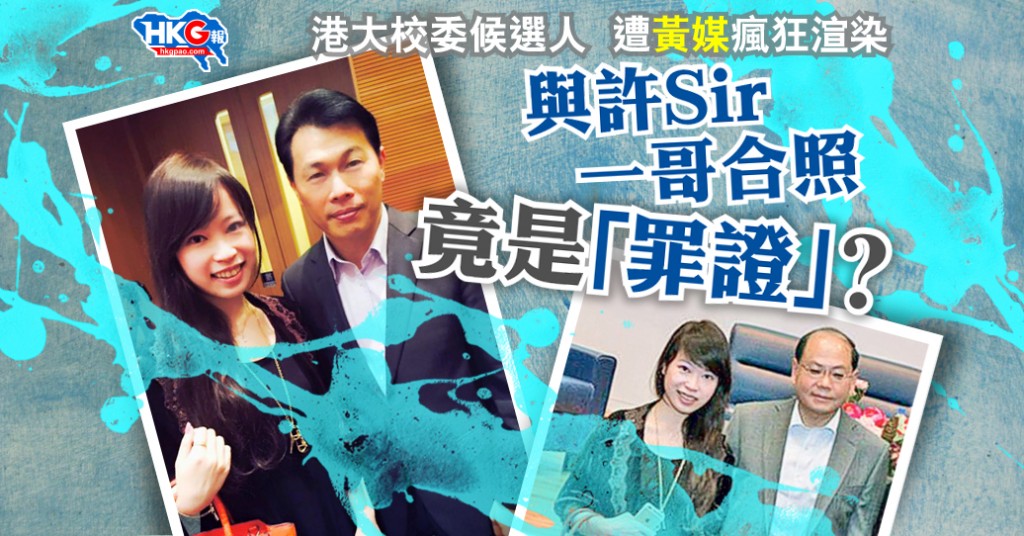
- The Hong Kong Federation of Students
executive committee is not elected by one-student-one-vote. So why don't
they start with fixing that first?
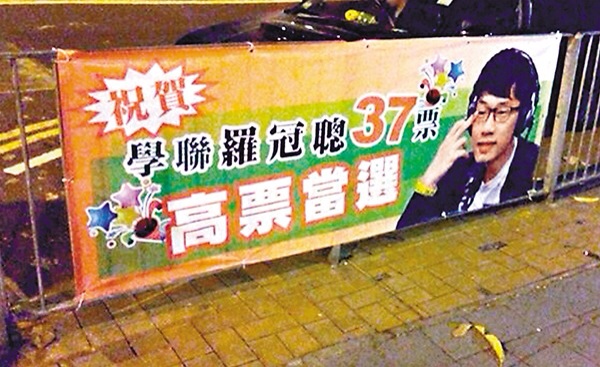
"Congratulations to Nathan Law for winning the Hong Kong Federation of
Students secretary-general election by a high tally of 37 votes in total."
- This Wong Hon-leung guy says that the Chief Executive isn't elected by
one-person-one-vote and therefore has no right to represent the people of
Hong Kong to supervise the universities. Fuck you! If it weren't for you
guys and your Occupy/Umbrella thing, we would be having one-person-one-vote
for the 2017 Chief Executive election! Instead, you have only guaranteed the
re-election of CY Leung by the 1,200-person election committee.
- Wong Hon-leung wasn't elected by one-student-one-vote and therefore has
no right to represent the students of the eight universities.
- Students at four out of the eight universities have voted to withdraw from
the Hong Kong Federation of Students. So Wong Hon-leung is even less
representative than the title of the organization suggests.
- The students speak as if they can be an
autonomous entity that is beyond outside scrutiny. Here is why the general
public wants to know about how the universities operate.
(University
Grants Committee)
2013/2014 Total Recurrent Grants
Chinese University of Hong Kong,
$3,679,700,000
City University of Hong Kong, $1,776,100,000
Lingnan University, $359,500,000
Hong Kong Baptist University, $904,000,000
Hong Kong Institute of Education, $649,700,000
Hong Kong Polytechnic University, $2,403,500,000
Hong Kong University of Science and Technology, $1,965,900,000
University of Hong Kong, $3,648,100,000
TOTAL, $15,385,500,000
There are 7 million people in
Hong Kong. $15,385,500,000 / 7,000,000 = $2,198 per capita. The citizens have
the right to know how their money is being spent.
Of course, the universities can always turn
down the government subsidies, go private and raise money on their own. Then
they shall be truly autonomous (except to that handful of big donors).
Alternately, the students can pay their own
way. There are about 100,000 students, so the average burden will be
$15,385,500,000 / 100,000 = $153,855 per student on top of what they are
already paying for tuition/board.
- "CY Leung has violently interfered with
internal affairs at the universities." That is an assertion that has so far
not be backed by any concrete direct evidence. The assertion is usually
backed up by the "fact" that the Chief Executive appoints a number of
university board/council members. However, they always get the facts wrong,
probably deliberately so.
(SpeakoutHK
@ YouTube)
0:15 Radio host: You have not
found anything about how Chief Executive CY Leung has influenced the council
members.
0:22 Wong Hon-leung (Hong Kong Federation of Students) CY Leung has directly
nominated seven members to the Hong Kong University Council.
0:33 Radio host: The first issue is that CY
Leung makes the appointments. Do you know how many council members were
appointed by CY Leung?
0:40 Billy Fung Jing-en (Hong Kong University Students' Union president)
There are six plus one. That is, there are six council members appointed
by CY Leung, and the council chairman is also appointed by CY Leung.
0:55 Civic Party legislator Alan
Leong Ka-kit: First, he appointed Lo Chung-mau and Arthur Li. Then ...
1:00 Radio host: Lo Chung-mau was elected by the academic staff.
1:05 Leong: Lo Chung-mau was ... yes ... yes ... you are really right.
The correct answer is that, by
law, the
Chief Executive can appoint seven members (including the chairman) to the Hong
Kong University Council. In truth, CY Leung has only appointed two members
as the terms of the other members who were appointed by the previous Chief
Executive Donald Tsang have not yet expired.
Do you have evidence that CY Leung controls
the other five members? And since Johannes Chan was voted down 12-8, where
did the other additional 5 unappointed votes (= 12-7) come from?
- Reference: William Waung,
University Autonomy, Academic Freedom & Independent Governance.
(SCMP)
October 9, 2015.
Chief Executive Leung Chun-ying met the
head of the University of Hong Kong in the weeks leading up to the
controversial rejection of a liberal academic's promotion to a senior
manager's job, the Post has learned. The revelation has raised fresh concerns
about political interference in the administration of HKU, but Leung's
office would only say: "The chief executive meets with people of all
backgrounds from time to time to exchange ideas."
A source close to the university said Leung
had sought meetings with HKU vice-chancellor Professor Peter Mathieson in
August and September to discuss the university's operation. "They met at
least once in the weeks before the university council's meeting on September
29," said the source, referring to the date when HKU's governing council
voted against appointing former law faculty dean Professor Johannes Chan
Man-mun as a pro-vice-chancellor.
Critics have linked Chan's rejection to his
friendship with Occupy Central organiser Benny Tai Yiu-ting. The decision,
which came after months of delay and controversy, was condemned by students
and alumni, who accused pro-government council members of politicising an
academic matter and threatened to challenge it in court.
It remains unclear whether Leung, who is
the university's chancellor by law, and Mathieson discussed the controversy. Mathieson refused to comment on the
meeting, but an HKU spokesman said: "He stressed that in the course of
representing the university's best interests, he meets with people from all
walks of life."
Ip, also convenor of the HKU Alumni Concern
Group, pointed out former governors, and later chief executives, served as
ceremonial heads of the universities. "It would be a huge workload to have
separate meetings with a university chief irregularly, let alone on a
regular basis," Ip said. "It was strange for Leung to meet with Mathieson at
such a sensitive time. I have reasonable grounds to believe Leung attempted
to exert influence à on matters such as Johannes Chan's appointment."
(Oriental
Daily) October 10, 2015.
The Hong Kong University
Students' Union, the Hong Kong University Alumni Concern Group, the Hong Kong University
Teachers and Staff Unions and other groups held an assembly on the space
outside the university library to condemn the university council for not
appointing Johannes Chan as pro vice chancellor. They demanded that the
incoming council president/members must be acceptable to the students,
teachers and staff. The organizers claimed that almost 4,000 persons attended.
Legislator and HKU Alumni Concern Group
member Ip Kin-yuen said that it has been reported that Chief
Executive/Chancellor CY Leung met twice with Hong Kong University
vice-chancellor Peter Mathieson twice before the council meeting. Ip wonders
if Leung applied pressure on Mathieson. He demanded the government make an
open disclosure.
(Oriental
Daily) October 11, 2015.
Earlier South China Morning
Post reported that Chief Executive CY Leung met with HKU vice-chancellor Peter
Mathieson in a closed-door meeting before the council meeting to decide on the
appointment of pro vice chancellor. Then a website reported that they met
twice or thrice, and not just once. Actually, CY Leung is also the chancellor
of Hong Kong University, so it would be normal for him to meet with the
vice-chancellor.
Hong Kong University issued a
written statement which said that in the meeting of CY Leung with Peter
Mathieson and university council chairman Leung Che-hung, the subject of the
appointment of the pro vice chancellor never came up.
Meanwhile, CY Leung was attending a function
yesterday. When asked about this issue, he said that he has never interfered
with the appointment of the HKU pro vice chancellor. He also said that the
news report was not being specific by saying that they met "weeks" before
the council meeting. How many weeks is that? Two or 50? Leung said that as
the chancellor of all eight universities, it is normal for him to meet with
various people including the vice-chancellors.
When our reporter checked back with Ip Kin-yuen,
he said that he does not know if CY Leung is lying or not. Besides, even if
they didn't talk about the appointment of the pro vice chancellor, Leung
could be applying pressure on other internal affairs of the university.
Therefore, Ip felt that there was no need to apologize for the serious
charges that he raised.
Video:
(Resistance Live Media)
https://www.youtube.com/watch?v=JCZ1nDLRUw4
Internet comments:
- I know that the pro-democracy
are obsessive-compulsive about the need to exaggerate attendance figures. But
this is ridiculous. How do you count 4,000 people from this photo?
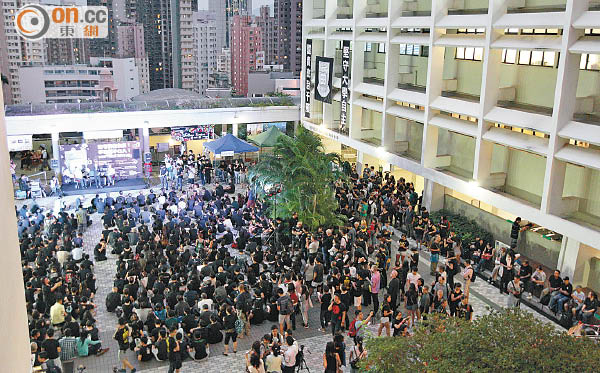
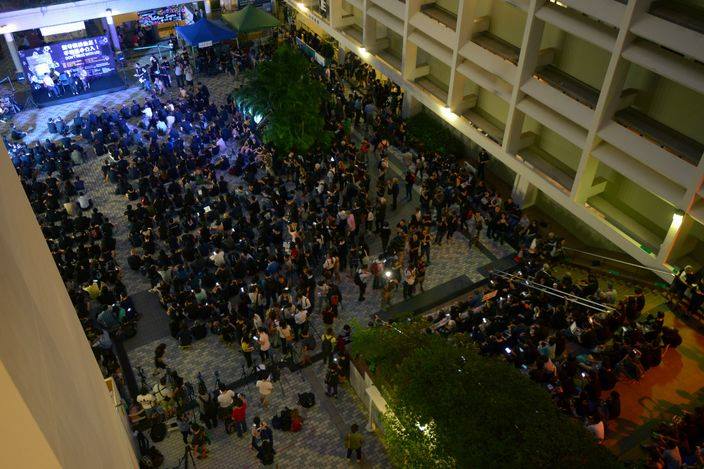
- (HKG
Pao) When you have a photo, you have the truth. As soon as the
bird's-eye-view photo showed up, Internet users came to heap scorn upon the
claim of 4,000. It is said that one Victoria Park soccer field can
accommodate 6,500 persons. So can Chung Shan Plaza outside the library
accommodate 4,000 persons? Some Internet users sarcastically said that they
needed to get their eyes checked because they were not seeing 4,000 persons.
Director Ko Chi-sum said: "No need to see an eye doctor. As executive
producer, I am an expert in counting heads. It's 400! But these compulsive
liars always multiply by a factor of ten. They are the best in lying to the
people."
- First the HKU
students flunked English with
Return Home Card.
Now they flunk mathematics by counting 4,000 out from 400.
- The Chinese
University of Hong Kong students who should be better in Chinese than the
Hong Kong University students have also flunked Chinese. (Oriental
Daily) In a banner about CY Leung's interference with the
universities, they said that the universities are in a state where "the lips
are cold and the teeth are lost."
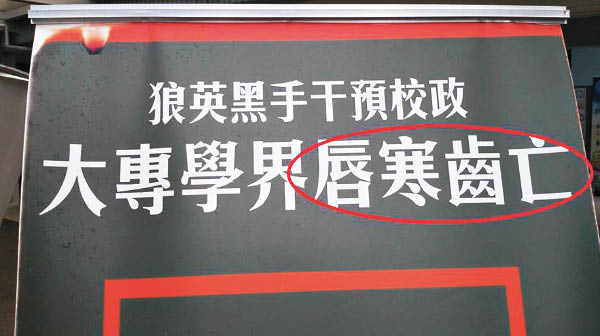
Doesn't make sense, does it? Well, they meant to say
唇亡齿寒:
If the lips are gone, the
teeth will be cold. That is to say, if
one of two interdependent things falls, the other is in danger.
- (EJinsight)
Three Hong Kong University of Science and Technology students flunked legal
theory and practice when they were arrested for stealing bamboos poles from
a construction site.
- This is near the
Double Ninth Festival (Chung Yeung Festival) when the ghosts of the
ancestors come out to be fed. They'll all there, except you need to be
endowed with the special paranormal abilities to see them.
- Hong Kong University chancellor CY Leung
meets with Hong Kong University vice-chancellor Peter Mathieson. Something
nefarious must be going on? If Leung never meets with Mathieson, then Leung
is failing in his job as chancellor. So why would you like Leung to do? Meet
or not meet?
- The answer is simple. Leung can meet with Mathieson as often as he likes,
but all proceedings must be videotaped and posted onto YouTube for the sake
of freedom/democracy/justice/transparency/right to know/universal values.
- A few days ago, the students
and teachers came out in academic gowns to demonstrate. The organizers
claimed 2,000 participants. Here is a photo of 2,000 persons:
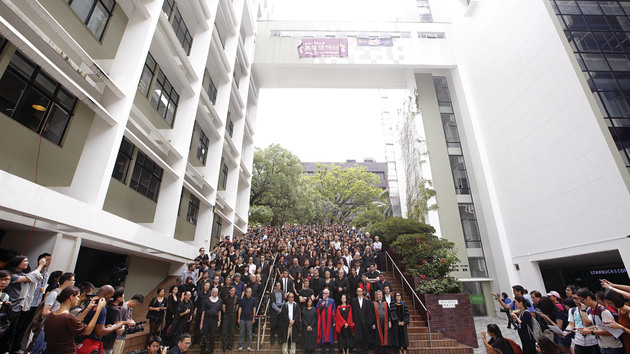
How in the world did they count 2,000?
- And the media are gullible
to report as is: (EJinsight)
Around 2,000 students and staff of the
University of Hong Kong (HKU) took part in a silent march Tuesday to
outline their concern over perceived political interference in the
universityÆs affairs. Signaling their aim to defend academic freedom and
institutional autonomy, the protesters began their march from the
universityÆs Centennial Campus and went on to Sun Yat-sen Place, where
they stood for a minute in silence. Around 30 teaching staff wore their
academic gowns while the others were dressed in black, Apple Daily
reported.
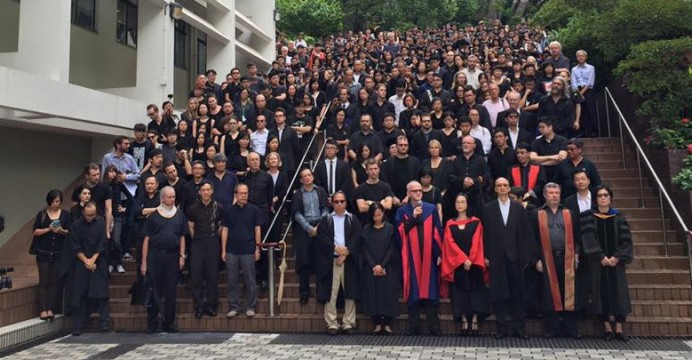
- That was not the most
interesting photo from that event. It is this one of a former Democratic
Party and regular Shopping Revolutionary named Virginia Fung King-man (see
HKG Pao). When she ran for District Councilor in 2003, she was 54
years old and filed that she was a secondary school graduate. Now she is
all of a sudden a Hong Kong University student/teacher/staff member. Did
she further her education in the interim? Well, in 2006 she was convicted
of defrauding the government out of $600,000 in rent subsidies and spent
18 months in jail. Did she take a HKU correspondence course when she had
lots of time in jail?
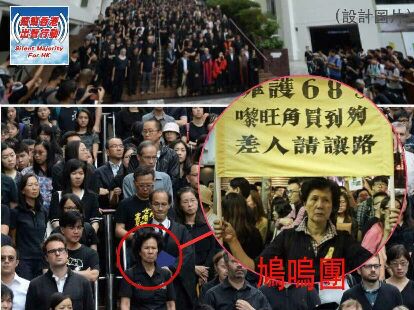
Here is
Fung
King-man running for district councilor in 2015.
Addendum: (Wen
Wei Po) November 27, 2015.
Last evening, the Democratic
Party released a statement to the effect their Central Committee has
accepted the decision by their disciplinary committee to expel Virgina
Fung King-man, who had entered the district council election against the
Labour Party. The action takes effect immediately.
Fung was a Democratic Party
member. From 1998, she had exaggerated the rent payment for her district
councilor's office for four years to defraud the government of more than
$600,000 in subsidies. In December 2007, she was found guilty of four
counts of filing false information. The magistrate pointed out that public
servants are held to a higher standard of ethical conduct and Fung had
betrayed the public by systematic fraud over many years. Fung was
sentenced to 18 months in prison, later reduced to 12 months on appeal.
This year, Fung entered the
Hung Hom Bay district election with the approval of legislator Raymond
Wong Yuk-man to run against Labour Party. On October 15, the Democratic
Party suspended her party membership. Thus, Fung could not run in the
election as a Democratic Party member. Nevertheless, she continued to
present her political affiliation as the Democratic Party and thus misled
the public. The Democratic Party has filed a complaint against her with
the Electoral Affairs Office.
Eventually, Fung got only
162 votes. The Lablour Party candidate Chiu Shi-shun got 1740 votes and
lost to the pro-establishment candidate Cheung Yan-hong who got 1811
votes. If Fung were not in the race and her votes went to Chiu, Chiu would
be the winner.
YouTube
https://www.youtube.com/watch?v=vuP-SfJfaoU Response by Fung to
the decision of the Democratic Party to expel her
- (EJinsight)
October 7, 2015.
Pro-Beijing politicians and
establishment camp members from Hong Kong UniversityÆs governing council
may be taking some comfort from the turnout figure at TuesdayÆs protest
march organized by staff and students.
In the rally, which came a week after
the university council blocked liberal law professor Johannes Chan from
becoming the new pro-vice-chancellor, only 2,000 students and teaching
staff took part.
While the number was enough to make the
government camp sit up and take notice, it however represents less than
10 percent of the universityÆs total staff and student strength.
According to HKU website, the
university had 7,197 academic staff in the 2014-15
academic year. As for the student population, while we do not have the
latest precise figure, it could be well above 25,000.
In the last academic year, the university had a total of
27,933 students, including
more than 6,000 from mainland China.
Now, what explains the relatively weak turnout at TuesdayÆs rally which
was aimed at outlining the need to protect academic freedoms and curb
political interference in the universityÆs affairs?
Some senior professors who took part in
the silent march said many junior colleagues chose to stay away as they
were afraid that their career prospects would be affected if they come
out openly and take a stand against the establishment.
As Chan was victimized for his liberal
views and support for pro-democracy activists, there was fear among
junior staff that they too might suffer if they stand up and denounce
the university council. Lecturers, for instance, may be denied
promotions or permanent tenures.
The argument definitely sounds
convincing, but what about the lack of more student participation? How
does one explain that?
Well, if we search for honest answers,
we may be staring at one stark reality: many students have either become
weary, or have simply resigned themselves to the prospect of BeijingÆs
hidden hand in key decisions of the university council.
And some may be even supporting the
councilÆs recent decision on Chan, as they believe an antagonistic
stance toward China wonÆt be in HKUÆs long-term interest.
While institutional autonomy must be
preserved as much as possible, the university also needs to learn to
operate in an environment where Beijing will seek to protect its own
interests, those students feel.
With students and staff from China
constituting a significant part of HKU now, it will also become more
difficult for the university to take a strong stand against political
interference from Beijing.
Student scholars from China accounted for more than 30 percent of HKUÆs
674 international professoriate staff last year. Also, mainlanders made
up over 64 percent of the total international student number at the
university.
Given all these factors, it is not
surprising that a large section of students chose to stay away from the
latest protest following the Johannes Chan saga.
While there is a general perception that local university students are
all pro-democracy and anti-Beijing, many youth are actually taking a
more realistic approach and avoiding overt hostility toward China.
The weak turnout at TuesdayÆs rally could prompt pro-Beijing politicians
to argue that the HKU councilÆs decision on Chan is being supported by
the universityÆs ôsilent majorityö.
(YouTube,
YouTube)
League of Social Democrats
legislator Leung Kwok-hung was eating a late night snack when confronted by
persons of different opinions.
0:01 (First man) Your mother's cunt! Fuck your
mother! You caused chaos in Hong Kong. You goddamned people! Your mother's
stinking cunt!
0:07 (Leung) What's the matter?
0:10 (First man) You are so fucking rich, and you are still eating trash?
0:16 (Another man) Please keep your voice down.
0:17 (First man) You are so fucking rich, but you still eat trash? Fuck your
mother! You are hogging a public housing unit. Your mother's stinking cunt!
0:24 (Third man) Fuck you! Fuck your mother!
0:31 (First man) Traitor! Dickhead! May your whole family die! Fuck your
mother! Fuck your mother! Fuck your mother's cunt!
0:44 (Woman) Now you know to call the police? Weren't you afraid of the
Black/Evil Police?
0:46 (Third man) People like that deserve to be fucking cursed out!
0:49 (Fourth man) We are trying to run a business.
0:50 (Third man) I know too. I patronize this place too.
Related link:
"Long Hair" Leung Kwok-hung versus "C9" Housewife
Addendum:
SaluteToHKPolice Facebook, January 9, 2016. An incident in which the
soccer player Leung Kwok-hung was chased by people who accused him of spitting
in public.
Man: Don't leave yet!
Another man: Fuck your mother!
Man: Throw garbage everywhere? Spitting? Fuck you! And you dare to curse other
people out? Fuck you! Not fucking you enough? I fuck your mother! Do you hear?
I fuck you. Turn around! Hey, Long Hair! I only fuck you because you spit!
Fuck you! Turn around and take a look! I keep telling you. I keep telling you
but you won't leave! Huh? You have to keep pressing. Why don't you chase me?
Come on! Are you coming over? Come again, come again, come again. Fuck your
mother! Fuck your mother! Fuck your mother! Fuck, fuck, fuck, fuck. Fuck your
mother! Fuck you, fuck you, fuck you. Okay!
Discoverhongkong.com: Hong Kong has strict laws about maintaining
environmental hygiene, including fixed penalty fines of $1500 for littering or
spitting. See what constitutes a littering offence
here.
Internet comments:
- This food stall is obviously
unlicensed because the seats are placed on an unlit sidewalk. Lawmaker Leung Kwok-hung
is aiding and abetting law-breaking activities.
- Leung Kwok-hung normally thinks that he is
good with words, but in this case he was completely overwhelmed. What can he
say in the face of the furious citizens? That he only makes $93,000 per
month? That he needs the public housing unit in case he loses the next
election?
- Of course, Leung Kwok-hung did the only thing that can be done under such
circumstances: Call the police. All of a sudden, they are "good police
uncles" and not "evil/black police" anymore.
- Leung Kwok-hung is a trailblazer in the destruction of the four principles
of "Reason, Peace,
Non-violence and No-foul-language". So he is getting a dose of what
he wanted others to have.
- Is it wrong to use foul language to curse
someone out? Not according to teacher
Alpais Lam. If the
Yellow Ribbons are willing to defend her unalienable right to say "What the
fuck!", then they must defend the right of these citizens to use the
same kind of foul language on Leung Kwok-hung.
- Of course not. It is the unalienable right of Yellow Ribbons to use foul
language against all those who disagree with them, but it is a crime to use foul language against Yellow Ribbons. This is the essence of
the Umbrella Revolution brand of democracy.
- The Yellow Ribbons say that the unpopularity
of CY Leung is clear because he cannot go anywhere without being chased and
cursed out. Well, if that is the sole criterion for unpopularity, then the
same can be said of the pan-democrats (see
#020). The only
thing for certain is that everybody is vulnerable when polite discourse is
tossed away.
(Oriental
Daily) October 10, 2015.
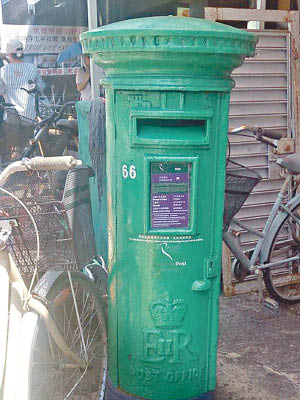
When Hongkong Post announced that it was going
to cover up the insignia of the British royal family in the colonial-era
mail boxes, some Internet users started a campaign to demand that these
boxes be preserved. As of 5pm yesterday, about 500 people have said that
they will participate in a campaign to send postcards to express their
demands.
(The
Guardian) October 7, 2015.
Hong Kong authorities are trying to
airbrush history, say conservationists, who are complaining old postboxes
still bearing the royal ciphers associated with BritainÆs rule are being
covered up.
Of the 1,148 iron mailboxes that dot Hong
Kong, 59 still bear the royal insignia as they were put in place before
1997, the year the territory reverted to Chinese rule. To mark the handover
of sovereignty all the mailboxes were painted bright green, covering the
royal red, while the Post Office logo was added.
The two oldest mailboxes, bearing the
ciphers of Queen Victoria, have been placed in local museums but others are
still in daily use. These include seven bearing the insignia of King George
V, two that were installed under King George VI, 46 that carry the cipher of
Queen Elizabeth II and one with the Scottish crown.
The Hong Kong Post Office has announced it
intends to cover up the royal insignia with a metal plaque, officially to
ôavoid confusionö among the public.
Conservationists are up in arms. ôThese are
very valuable mailboxes,ö said Peter Li Siu-man of Conservation Alliance.
ôThey are antiques, street monuments that do not belong to a museum, but are
part of Hong KongÆs heritage and daily life. They are made of cast iron,
which makes them very durable.ö
The group has created an Old Mailboxes Fans
Facebook page, inviting members of the public to post photos of the royal
cipher postboxes, with a Google map that allows them to locate each one.
The Post Office, which could not be reached
for comment, has not explained further why the crowns on the mailboxes have
suddenly become problematic, but many believe the political climate is to
blame.
ôThere have been some very sensitive
comments expressed recently on decolonisation,ö said Li, referring to the
angry remarks by Chen ZuoÆer, a retired Beijing official who berated Hong
Kong for its ôfailure at decolonisationö.
Chen, the former deputy director of the
Hong Kong and Macau Affairs Bureau, did not mention that Hong Kong was a
colony of election, with a population composed of refugees from the
mainland, but instead criticised those who didnÆt ôcast aside the colonial
legacyö as ôharming Hong Kongö.
In a city where constant real estate
developments have obliterated much of its colonial architectural heritage,
even the humble royal-era mailboxes may soon be unrecognisable.
Internet comments:
- Why might someone be confused
about mail boxes of different designs?
Here is the mail box that is most likely on your street corner. It is identified as the
property of Hongkong Post, and you use it on a regular basis. You have seen
similar ones all over Hong Kong.
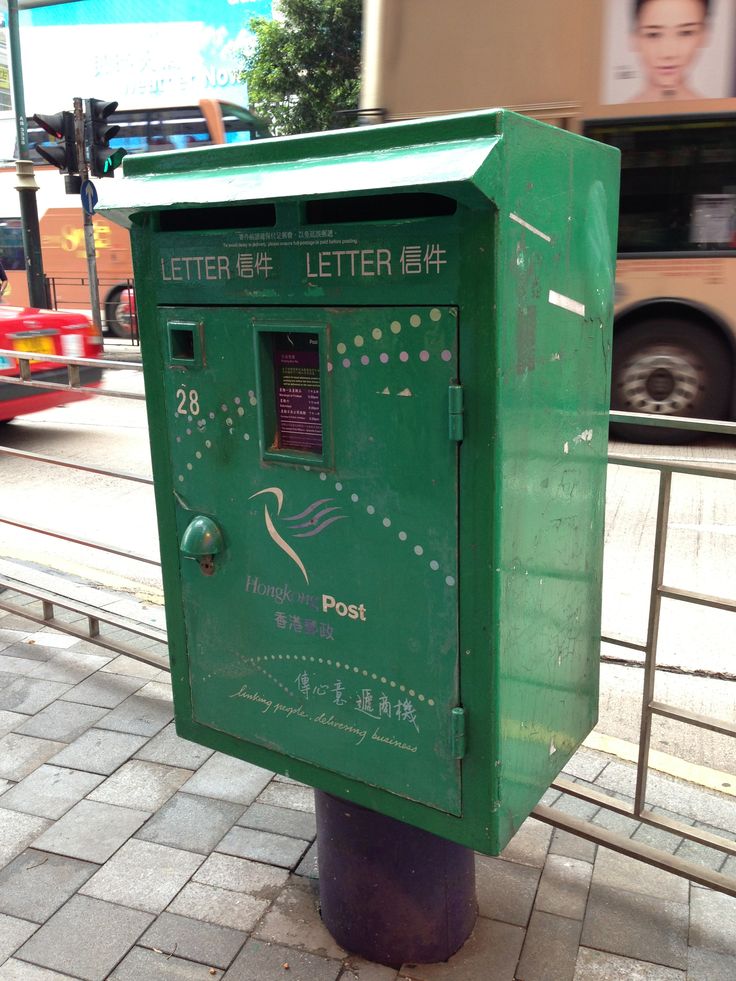
But today you are running an errand in another
district, and you see this object:

It says
"EIIR Post Office". You've never seen anything
like this before. Are you going to stick your letter with the credit card
payment check into this box?
- (Oriental
Daily) Regular demonstrator Lui Yuk-lin showed up at the Central
Post Office to protest. She pasted two pieces of paper saying "Hongkong Post
is shameful for murdering history". She posed holding two replicas of the
old mail boxes and demanded history be respected.
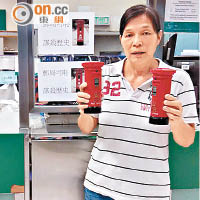
This short detour with the props captures the
absurdity of the whole thing. There are 1,150 mail boxes in the streets of
Hong Kong where the public can put their cards and letters for the Hongkong
Post to pick up. Of these, 59 are old mail boxes with various royal crown
insignia and
royal
cypher (such as
EIIR).
Look, if you
are nostalgic about the British colonial-era mail boxes, just remember that
they were red. After the handover in 1997, all mailboxes are painted in green.
If your collective memory has a green colonial-era mailbox, then you must have
been sniffing airplane glue.
By the way, where were the protestors when the
mailboxes got painted green from red? Why are they suddenly all
preservationists in 2015 but not before?
(EJinsight)
October 9, 2015.
A
grumpy coupleÆs online attack on a police officer who ticketed them for a
parking violation in Ma On Shan did not go according to plan, Apple Daily
reported Friday.
The husband and wife, surnamed Yeung and
Tong, were sitting in their car with their children in a space reserved for
green minibuses at a public transport exchange in Wu Kai Sha at around 2
p.m. Thursday when a police officer referred to as Ah-hang issued them a
parking ticket.
The couple took a video of the exchange
between them and Ah-hang on their smartphone and posted the two-minute,
39-second clip on a discussion group for Ma On Shan residents in an attempt
to badmouth the police officer. To their consternation, almost all the
netizens who responded to the video blasted the couple for using foul
language at the police officer in front of their children in the car and for
making sarcastic comments about Ah-hang being merely a frontline officer.
Yeung and Tong were quick to publish an
open apology online to Ah-hang Thursday night, saying they had reflected on
their mistakes and fully regretted their unacceptable and insulting
behavior. Netizens praised Ah-hang for his high
emotional intelligence, professionalism and ability to keep calm despite
being confronted with abusive language.
In the video, when Yeung swore furiously at
him, Ah-hang merely replied ôsame hereö. When Yeung challenged him to further his
studies in the hope of being promoted to inspector, Ah-hang said, ôthere are
advantages to being a frontline officerö, which some internet users noted
favorably as being quite a philosophical sentiment.
The couple had reportedly called the 999
emergency hotline asking to see a senior police officer. They also filed a complaint against Ah-hang
with the Complaints Against Police Office (CAPO), saying his attitude was
problematic and demanding an apology. Yeung and Tong subsequently uploaded the
video online, which proved to be a huge mistake.
Ah-hang, who is in his 20s, has been
working as a police officer for six years and was assigned to the Ma On Shan
regional team two years ago. The officer in charge of the New
Territories South police district called Ah-hang to compliment him on his
professional and restrained behavior, the report said.
Link with video:
http://news.mingpao.com/ins/instantnews/web_tc/article/20151008/s00001/1444279290722
Video:
https://www.youtube.com/watch?v=dRVUtHfQhhc
0:01 (Child) Great! Post it on the
Internet!
0:03 (Woman) Can you be faster? I really want to reach the school. I am in a
hurry. You say something. You reply. You are not responding.
0:11 (Child) Hurry up!
0:18 (Woman) He is doing his job properly. You can talk back, but you are
not talking back.
0:24 (Man) Let's see if your mother gives birth to a child without an anus.
Your mother's cunt!
0:31 (Child) Don't be like that, daddy!
0:36 (Man) You deliberately came out to intercept me. Fucking stupid! Fuck
your mother! Even the Chief Executive has broken the law! Dickhead!
0:44 (Policeman) The Chief Executive is processed in accordance with the judicial process.
0:45 (Man) Your mother's law! Go study some more!
0:48 (Woman) Can you be faster? I'm in a hurry. I really want to reach the
school.
0:50 (Man) Fuck your mother!
0:54 (Woman) You don't have to do this just to show off.
0:56 (Policeman) Issuing a ticket isn't showing off.
0:57 (Man) Hey, go eat shit! Hurry up!
1:00 (Policeman) Issuing a ticket isn't showing off.
1:01 (Man) Fuck your mother! You work a couple more years.
1:04 (Policeman) I have more than two years. I have more than twenty years
to work slowly.
1:06 (Man) Yes, fuck your mother!
1:08 (Policeman) Same to you.
1:18 (Man) Your mother going to have a son sooner or later. Your
mother's stinking cunt!
1:20 (Policeman) My mother gave birth to a son and that would be me.
1:22 (Man) Huh?
1:23 (Woman) Hurry up! How much longer will you be taking? I am going to be
late.
1:32 (Man) I see that you look like a beggar dog. Fuck your mother!
1:33 (Woman) Hurry up! I let you issue a ticket so you should hurry up. I am
in a hurry to get to the school. You see that I have to look after so many
kids.
1:40 (Man) We are not stopping you from issuing a ticket. Only $450 but you
are still being fucking stupid.
1:48 (Man) Fuck your mother! You work here everyday. Is your mother human?
You ticketed one taxi but not the other. I said sorry to you. Your mother's
stinking cunt. You want to look like a cunt. May your whole family die.
2:02 (Man) Are you done yet? Why do you taking so much fucking time?
2:05 (Policeman) I am writing it. Please wait a moment.
2:07 (Man) Fuck your mother. Study a few more years and take the exam for
inspector. Dickhead!
2:13 (Woman) You take so much time to write just a few words.
2:13 (Policeman) There is some pleasure not being a senior officer.
2:15 (Man) Pleasure your mother! Pleasure!
2:17 (Child) Daddy, don't talk so loud.
2:21 (Woman) I only know that you took three minutes to write up a ticket. I
have filmed everything.
2:22 (Policeman) You go ahead and film. I did take 3 minutes to write. There
is no problem.
2:28 (Man) Is it necessary to issue another ticket here? The yellow line.
2:31 (Policeman) It is not necessary to issue a ticket, because ...
2:31 (Woman) You hurry up, you hurry up, you hurry up. I am in a hurry.
Internet comments:
- Why were Yeung and Tong so quick to
apologize? That's because Internet users identified them. Yeung is a BBQ
meat chef and Tong is a receptionist at the Star Seafood Restaurant in Sham
Shui Po. That restaurant was flooded with telephone calls to make
reservations and take-out orders for BBQ meat.
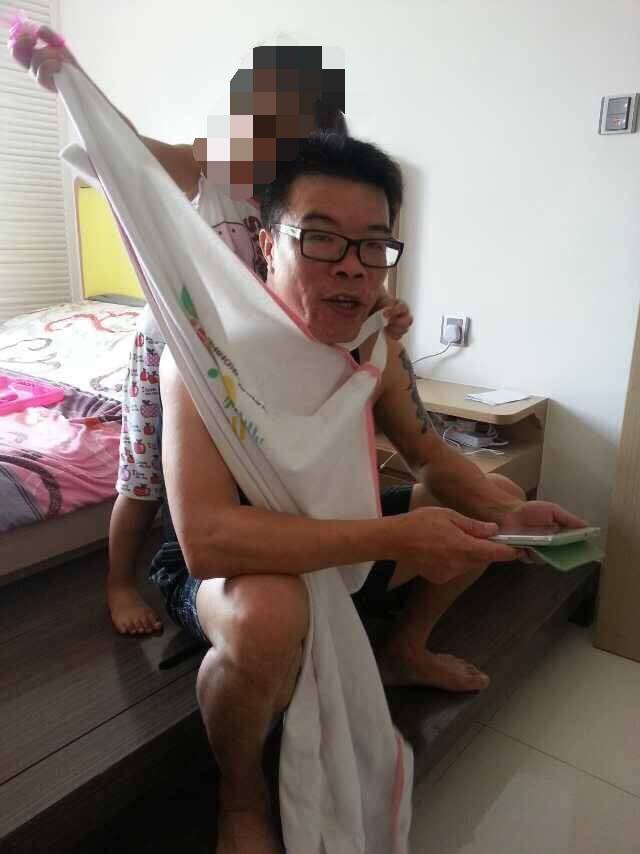
Yeung

Tong
(SCMP)
When you disrespect Hong Kong police, you don't deserve to be treated gently
by them. By Yonden Lhatoo. October 22, 2015.
I came across a shameful viral video online
last week showing a Hong Kong police officer being verbally abused by a
family he had pulled over for a traffic offence. The 2¢ -minute clip, taken
from inside the familyÆs vehicle, shows the young officer writing up a
ticket while a belligerent man, woman and child yell at him to hurry up. The
man launches into one of the foulest tirades IÆve heard in Cantonese,
bringing the officerÆs anatomy, mother and entire family into the
expletive-laden equation.
The policeman takes his time with the
booking, but does nothing about the aural assault. IÆm impressed by his
self-control and composure, but also incredulous that the police force
allows its frontline personnel to put up with such vile abuse.
WhatÆs even more appalling is that this
family decided to show off their ôvictoryö over the policeman and post the
video clip online. Talk about delusional self-righteousness. Their only
saving grace is that they had to post a follow-up apology after triggering a
barrage of condemnation from other internet users.
Let me say this to those three people in
the vehicle, including the child, and anyone else in Hong Kong who might
take their side: You have no idea how lucky you are to live in a city
policed by such gentlemen. Imagine if this had happened in the worldÆs
ôgreatestö democracy, the United States, which often lectures us on human
rights. Someone would have been manhandled, tasered or perhaps even shot
dead.
Ditto in India, the worldÆs biggest
democracy. A search on YouTube for recently leaked video clips of police in
the state of Gujarat going on the rampage in August will give you an idea of
how bad it is out there. They can be seen vandalising public property,
smashing car windows with sticks and rifle butts, and terrorising citizens
with total impunity.
ThereÆs a whole bunch of other video clips
online showing Hongkongers berating police officers. TheyÆre displayed like
trophies celebrating peopleÆs success in ôsticking it to the manö.
This is apparently a spillover from last
yearÆs Occupy protests, when the lines between whatÆs legal and illegal were
blurred to the extent that police officers were expected to not only allow
lawbreakers to block roads in the name of democracy but to actually protect
them while they broke the law for 79 straight days.
Without getting into the justification û or
lack thereof û for the civil disobedience movement, I just want to say the
drubbing that morale took last year was damaging enough for the police
force. This kind of public-versus-police fallout is the last thing our city
needs.
Like it or not, one of Hong KongÆs biggest
strengths is its police force. Our officers are not called ôAsiaÆs finestö
for nothing. Granted, the bad apples bob up occasionally, but thereÆs an
effective system in place to sort them out. Disrespecting and demoralising
them will undermine the foundations of the safest city in the world. That
would be the real beginning of Hong KongÆs downfall.
The question of criminalising verbal abuse
against police officers has been pretty much swept under the carpet, given
that Hongkongers are acutely aware of their rights and freedoms and
ultra-sensitive to anything they see as a threat to them.
So frontline officers take it on the chin,
even though theoretically they have the right to arrest offenders on the
grounds of ôdisorderly conduct in a public placeö, or ôresisting or
deliberately obstructing police in the execution of their dutiesö.
This is more than just a matter of
foul-mouthed nimrods being obnoxious to frontline officers. At a deeper
level, it reflects a misguided sense of entitlement and contempt for
authority that should be nipped in the bud. If you think we have it bad
without Western-style democracy in Hong Kong, wait until you get
Western-style law enforcement. Then youÆll really have something to cry
about.
Those who disagree and sympathise with the
family in the video should try that kind of tinpot tyranny on London or New
York police. They might come back with newfound appreciation and affection
for our police officers û if they come back at all from hospital or prison.
(Oriental
Daily) October 3, 2015.
Previously, Hong Kong MTR
employees refused a female student to carry a traditional Chinese music
instrument on
board at the Tai Wai station. Local musicians have issued a call to protest at
the Tai Wai station today between 6pm and 8pm. So far, more than 3,600 persons
have signed up on Facebook to participate. All participants are to carry large
musical instruments and play music outside the station. They want to continue
to have the right to use the subway.
The organizer Teresa Lung Man-wai said on
radio today that they want to focus on the issue of musical instruments and
not about any parallel traders moving their wares on the subway. She said
that the MTR has always been lenient, so that her younger sister could
carry a double bass violin.
(Oriental
Daily with video) October 4, 2015.
Although several thousand
persons signed up on Facebook, ultimately only about 60 persons brought their
musical instruments to the scene. However, the event also attracted several
dozen regular Localist demonstrator who brought along their British
Dragon/Lion flag for Hong Kong independence, yellow umbrellas and "I want
genuine universal suffrage" banners to carry out their Shopping
Revolution/Reclaim actions. Several dozen Civic Passion members and other
Localists blocked the elevator and ordered the mainland Chinese passengers to
"go back to the mainland."
After the Tai Wai protest ended at 8pm, Civic
Passion member Cheng Chung-tai and "four-eyed brother" Cheng Kam-mun led
more than a dozen people to Sha Tin where they intercepted individuals
towing luggage cases and ordered the MTR employees to measure the sizes.
They cursed out the mainland Chinese travelers.
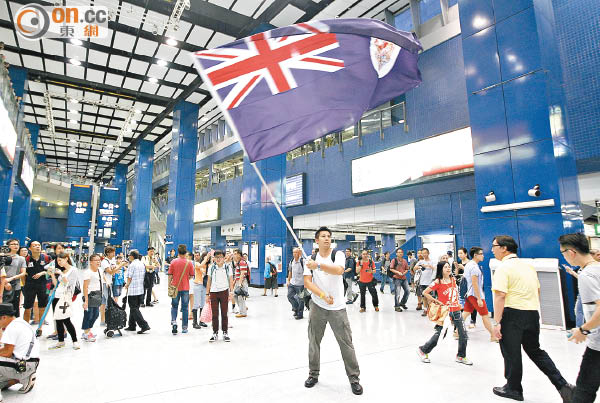
"Captain America" Andy Yung waving the British
Dragon/Lion flag for Hong Kong independence.
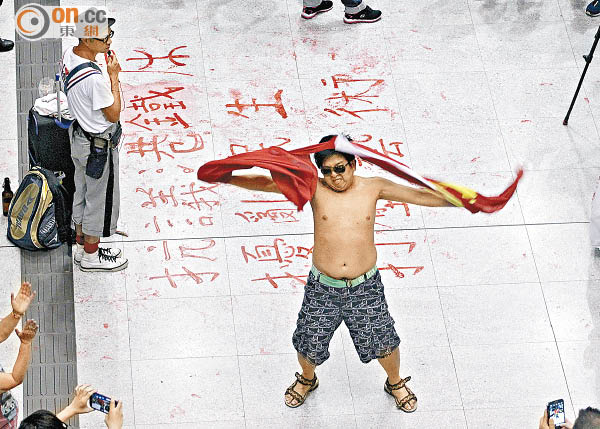
Demonstrators wrote slogans in red paint on
the floor tiles while one of them ripped up a Chinese Communist Party flag.
[Comment: Some poor sod is going to mop the floor, but of course
pro-democracy activists don't care.]
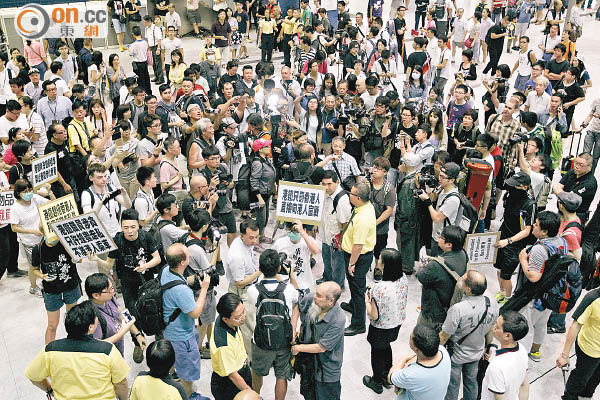
As usual, there were many more photographers
than demonstrators.
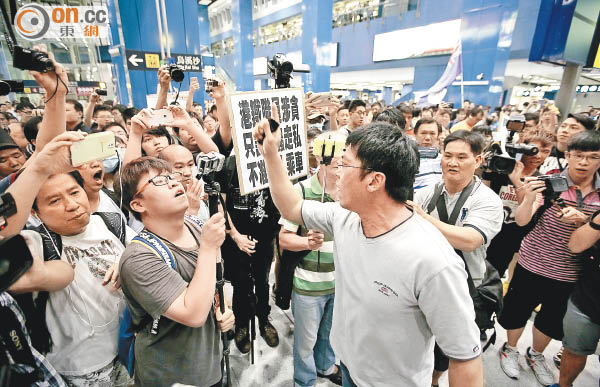
Demonstrator versus passenger with different
opinions
Videos:
(Big Person)
https://www.youtube.com/watch?v=yPCiIC2LCj8
(SocREC)
https://www.youtube.com/watch?v=zqWGDi5N-Gw
(SocREC)
https://www.youtube.com/watch?v=6mSvW2yxNW0
(Resistance Live Media)
https://www.youtube.com/watch?v=UT37bPLi7qs
Internet comments:
- (Speakout
HK @YouTube) Who came out to defend the musicians' right?
0:25 Cheng Chung-tai (Civic Passion)
0:30 Han Lian-shan (teacher who went on hunger strike against national education)
0:35 "Captain America" Andy Yung Wai-yip
0:39 Barry Ma (DLLM Orchid)
0:44 Masked anti-parallel trade demonstrators
0:55 The organizers and participants of the original event acknowledged that
their event was distorted and hijacked.
1:07 Some of the demonstrators moved onto the Sha Tin station to surround
mainlanders towing luggage cases.
1:31 Confrontation between black-shirt demonstrators and passengers
- An earlier incident at 7:40pm on October 3,
2015 with some Golden Forum users deciding that they were going to enforce
the law if the MTR employees won't. The video is at (On8
Channel @Facebook) (copy
@YoutTube)
(Ming
Pao) The video began with one black-shirted man and one
black-shirted woman standing by the subway door and demanding the MTR
employees to measure the luggage inside the car. The MTR employee said
"alright," asked the man and woman to leave and told the train driver to
depart. But the man and the woman said: "We don't trust you." They demanded that
the MTR employees move the luggage out of the car onto the platform. The man
used his body to block the train door from closing. A passenger tried to
stop the man and the woman and there was some pushing and cursing. The
police came. The train left the station. The MTR employee measured the
luggage case (as 88m, 40mm, 55mm adding up to 175mm) and said that it was within the
limits. The MTR employee apologized to the owner "Thanks, sorry." The train
arrived at Fotan Station where the persons involved alighted. The owner of
the luggage continued with the trip without ever uttering a word throughout.
- It is in fact against MTR
regulations to interfere with train operations or otherwise annoy other
passengers. For preventing the doors from closing, the fine is $2,000.
- When you block one train from departing,
all other trains behind this one are blocked as well. So you say that you
block tens of thousands of people from going home because you want to
carry out justice? Was justice served to those persons who were delayed by
you?
Delay No More!
-
When you are unhappy with the government, you use Occupy Central to harass
other citizens. When you are unhappy with the MTR, you harass other
passengers. This is completely consistent. Therefore it makes perfect sense.
- Isn't this funny? You want to stop
parallel traders, so you demand the MTR to crack down on over-sized
luggage because they interfere with other passengers. The MTR started measuring the carry-on's and rejected certain
large-sized musical instruments. And now you are having a hissy fit!
- (YouTube)
A second view of the same incident from outside the train. The train left
leaving a screaming black-shirted woman who explained that they used their
body to prevent the train from leaving because a man was assaulting a woman
inside the departed train.
- This is odd because there are several video angles of the same incident. This had
to be a concerted plan with several cameras. Furthermore, the intercept took place only after the
carrier entered the car and then the doors were prevented from closing in
order to create maximum disruption.
(Oriental
Daily) October 3, 2015.
Yesterday morning, Labour Party
chairman and Legislative Councilor Lee Cheuk-yan accompanied two Labour Party
members to file for district council elections in Tsuen Wan. Lee told those
present that the pro-establishment camp dominated the district councils and
spend the money for their own entertainment. He was promptly booed by the
supporters of other candidates. A middle-aged woman said that Lee Cheuk-yan
was the one who was wasting public money by filibustering in the Legislative
Council. She said that Lee has so far refused to admit that he took political
contributions from Next Media's Jimmy Lai. She yelled repeatedly "You are good
for making trouble" and "you make trouble at the Legislative Council." Lee
Cheuk-yan looked embarrassed during this encounter.
SocREC video:
https://www.youtube.com/watch?v=2_mV5cXIOf4
Meanwhile Democratic Party
vice-chairman Andrew Wan accompanied party members to file for the Kwai Ching
District Council elections. When Wan called out "pan-democrats unite for the
community," someone countered with "Give me back my elections" in reference to
the fact that the pan-democrats vetoed the one-person-one-vote plan for the
2017 Chief Executive election. That person added: "Thanks a fucking lot!"
(HKG
Pao) October 4, 2015.
According to the records, Andrew
Wan has attended only 18 Audit Committee during his four years as District
Councilor. In 2013, he attended only 1 out of 46 meetings. In 2015, he has
attended none of the meetings. In the 18 meetings in which Wan attended, the
first five meetings were intended to elect the chairpersons and deputy
chairpersons and took just one hour, with the shortest one being only for 3
minutes. Apart from these 5 special sessions, Andrew Wan arrived late or
departed early in 10 of the other 13 formal meetings. He was on time only on
three occasions.
According
to the records, Andrew Wan has spent 23 hours 3 minutes in the Audit
Committee meetings. Over the course of the four years, he earned a total of
$3,791,564.80 in salary and subsidies. Therefore, Andrew Wan is the District
Councilor with the highest hourly pay.
In response to the Wen Wei Po reporter, Andrew
Wan blamed it on the lack of issues at the Audit Committee.

(Oriental
Daily) October 12, 2015.
About forty to fifty
pan-democrats were holding a rally in Tsuen Wan. Suddenly someone tossed two
water bags from above. Two persons were splashed, including a reporter. The
arrested a 29-year-old man and a 31-year-old man for throwing objects from a
high place.

(Hong
Kong Free Press) October 13, 2015.
A group of seven people running in the
coming district council election have put yellow ribbons û a symbol of the
pro-democracy Occupy protest or umbrella movement last year û on their
campaign pamphlets, but they are being criticised by groups that supported
the protest as ôfake umbrella soldiersö who aimed at snatching votes from
other pro-democracy camp candidates.
A new Facebook page ôNew Youth Groupö was
started on September 18. Deep Li Chak-sum, one of the members of the group
running in the Nam Fung constituency of the Eastern District, has put a
yellow ribbon on his campaign pamphlet, which reads ôSay no to the wolf
[Chief Executive Leung Chun-ying], pro-Beijing camp and fake democracy,ö and
his group are ôagainst the pro-Beijing and pro-democracy camp controlling
the district council and exploiting peopleÆs rights.ö
Six other people of the group
running in the election shared similar or identical sets of pamphlets. They
shared phone numbers for people to contact them through whatsapp or wechat.
Umbrella Unity, a group which supported the
Occupy protest, has said on their Facebook page that the members of the
group were ôfake umbrella soldiersö, not to be confused with those who
decided to run in the district council election after joining the protest.
Li will challenge incumbent Democratic
Party district councillor Cheung Kwok-cheong. Cheung won by 889 votes in the
last election in 2011.
New Youth Group posted a message on its
page today that said, ôIf we wanted to snatch votes from the pan-democrats,
we would only target the pro-Beijing camp, not both camps. Therefore, how
can we snatch votes from pan-democrats?ö
The message today also read that they were
ôharassed by pan-democratsö and ôthreatened by several young people who
claimed to be triad members, we believe it was harassment by the pro-Beijing
camp,ö after local media reported them as ôfake umbrella soldiers.ö
Andrew Chiu Ka-yin, convener of the group
Power for Democracy, which coordinates pan-democrat candidates for the
election, told Apple Daily that the members of the New Youth Group û which
he also dubbed ôfake umbrella soldiersö û never showed up during the period
of coordination: ôThey know exactly what they are doing, and the people who
support democracy have clear eyes [to distinguish them from others].ö
Li was also accused of being a triad
member, after netizens on HKGolden forum found a Next Magazine report last
year saying a person with the same name as him was jailed for nine months
for claiming to be a triad member.
Li told HKFP that he was never
jailed, and that the accusation was wrong as ôCap 547
District Councils Ordinance 21(e) said with details that a person is
disqualified from being nominated as a candidate at an election, and from
being elected as an elected member, if the person has been convicted in Hong
Kong or any other place, of an offence for which the person has been sentenced
to imprisonment for a term exceeding 3 months.ö
Cheung Kwok-cheong told HKFP, ôI am too busy
campaigning for the election, I have no idea about him except he is running
in the district.ö
Yang Mo, who was an appointed district
councillor of the Southern District and considered pro-Beijing, was another
candidate nominated in the district.
Winnie Wun Kei-yan of the group will
challenge incumbent Democratic Party district councillor Henry Chai Man-hon
in the Wah Fu North constituency of the Southern District. Chai won by 423
votes in the last election.
Chai told HKFP, ôI urge voters to vote for
the pan-democracy camp candidates designated by our coordination mechanism,
so that we can beat the pro-Beijing camp.ö
Wong Choi-lap of pro-Beijing DAB Party and
independent candidate Law Yuet-wah were also nominated in the district.

(Hong
Kong Free Press) October 12, 2015.
Localist group Civic Passion has announced
that six of its members will be running in the upcoming district council
elections in November. The group will be up against the Democratic Party in
five of the six districts.
Cheng Chung-tai, a teaching fellow at
Polytechnic University, will be directly challenging Democratic Party
district councillor and lawmaker Albert Ho Chun-yan in the Lok Tsui
constituency in Tuen Mun.
At a campaign kickstart event, Cheng said:
ôIt is an important election for Hong Kong people to choose whether they
support those who can represent their, and the localistsÆ voice.ö
While localist groups
support democracy, they are better known for their anti-communist stance and
close association with movements promoting the expansion of Hong KongÆs
autonomy and independence.
ôTuen Mun
residents affected by parallel trading would not agree with Albert Ho and
the pan-democrats who have criticised protests, saying they have æcrossed
the lineÆ,ö Cheng said.
Cheng said that Ho did had failed to carry
out a ôpseudo-referendumö on political reform through a by-election by
not resigning from the legislature as promised. ôHe does not deserve to be a
pan-democrat councillor anymore.ö
He also said that Ho had helped to lower
the year limit for new immigrants to apply for government aid and
thus betrayed Hong Kong peopleÆs interests.
In response, Albert Ho told Ming Pao that
ôit doesnÆt matter, I wonÆt pay too much attention to them.ö He said that
the move would not affect his campaign, but he questioned why Cheng did not
choose to run in neighbouring districts where a pro-Beijing district
councillor remained uncontested. He said Cheng ôdid not aim at winningö and
was ôpaving the wayö for the pro-Beijing camp.
Former Law Society president Junius Ho
Kwan-yiu and former Democratic Party member Yuen Wai-chung have also
announced campaigns in the Lok Tsui constituency.
Incumbent Democratic Party district
councillors Au Nok-hin and Lo Kin-hei of Lei Tung I and Lei Tung II
constituencies in Southern District will also be contested.
Timothy Tsoi Man-lung, who will be
challenging Au, said that his run was aimed at ôexposing how the Democratic
Party has betrayed peopleÆs livelihoodö including joining two closed door
meetings with the China Liaison Office.
Pro-Beijing DAB party members will also be
running in the constituencies.
Other constituencies where Civic Passion
members will run include Tin Ping West in North District and Tsz Wan West in
Wong Tai Sin, where Democratic Party members are running against the
incumbent pro-Beijing Federation of Trade Union and DAB party district
councilors respectively. Civic Passion candidates will also stand in Un Chau
& So Uk in Sham Shui Po, where only one incumbent DAB party councillor
is running.
Civic Passion did not opt to join the
pan-democratic campÆs coordination mechanism to avoid running against each
other.
In the last district council election in
2011, Democratic Party members were targeted by the People Power party for
supporting the governmentÆs political reform package in 2010. The Democratic
Party rejected the governmentÆs new political reform package in June.
(Wen
Wei Po) October 12, 2015.
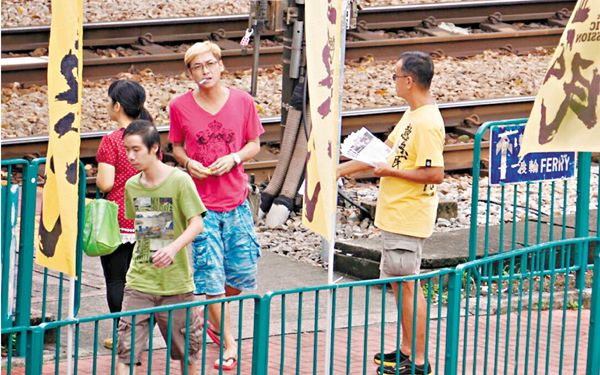
Civic Passion members handing out leaflets at a Tuen Mun Light Rail station
Cheng Chung-tai, nicknamed "Civic Passion
Worm", was one of the earliest Civic Passion members to begin canvassing.
Early last month, Cheng set up a street booth in Lok Tsui district (Tuen Mun).
Recently, our reporter observed that Cheng and three Civic Passion members
were distributing pamphlets around Mei Lok Garden and the light rail
station. Mei Lok residents said that these pamphlets were mostly about
"Localism/Democracy" and they used a megaphone to advocate the
overthrow of the central government. At the same time, Cheng denounced
Democratic Party legislator Albert Ho for betraying the people of Hong Kong.
Many Lok Mei residents do not appreciate Cheng's message. "First of all, he
won't talk about how to serve the Lok Tsui community. Secondly, he only
wants to pitch his so-called 'democratic ideas.' Thirdly, he curses out 'AV
Yan' (=Albert Ho's nickname). I really don't know what he wants to do for
the people of Lok Tsui. Most likely, this is just an internal squabble."
Since Cheng Chung-tai is not a Lok Tsui
resident and Civic Passion does not have an office there, it is hard to say
how many votes he will get. But before that, Cheng needs to secure ten
signatures from local residents before he can become a candidate. It was
thought that his celebrity status could easily secure that number, but he
found to his surprise that practically nobody wants to sign. Finally, Civic
Passion used Facebook to call on supporters to come forth with the
signatures. If Cheng can't even get ten signatures to nominate him, how many
votes does he expect to get in the actual election?
In like manner, Civic Passion member Wong
Yun-kay wants to run in the Lei Tung 1 district. On March 1 during the
Reclaim Yuen Long action, Wong took part but made sure that he wore a mask
to avoid identification. Wong also had a problem with securing enough
signatures for nomination.
Our observations in Lei Tung
(South Island) and Yuen Chow (Sham Shui Po) are that these Civic Passion
candidates like to yell through the megaphone, but even more so they want
passersby to sign the nomination. But practically no one signs. According to
one Civic Passion member, "Frankly, they don't know anything about you. What
would they hand over their personal information (such as Hong Kong ID number
and address) to you? Who knows what it will be used for?"
(Wen
Wei Po) October 14, 2015.
The policy platform of Civic
Passion advocates "Nation-building for Hong Kong" and "The People setting up
a Constitution" which will overthrow the Basic Law. However, the District
Council election regulations require that the nominees declare that they
"support the Basic Law and guarantee their loyalty to the Hong Kong SAR." So
how can Civic Passion members such as Cheng Chung-tai enter the election?
When asked, Cheng was apparently taken by surprise. He replied that
"nation-building" was just a proposal which only means that they want to
bring the voices of "localism" into the district councils. "When you build a
new nation, you need to have guns. That would be breaking the law. We don't
think that this should be considered. We are hoping that the people of Hong
Kong can bring the voices of Hong Kong back into the district councils."
For all those who think that
they are building a Hong Kong nation, this must be disappointing. Civic
Passion's idea of nation-building consists of just bringing Hong Kong voices
into the district councils, as if the current district councilors are
aliens who dropped in from outer space. If the Civic Passion candidates are elected, they will have to take the oath of loyalty to the
Basic Law. So what is the point of screaming "Resistance" all the
time?
Frankly, Civic Passion is just
an opportunistic radical organization. They like to yell "Valiant
Resistance" but they are actually scared of being arrested. Their so-called
resistance is always about fanning the passions of young people while people
like Wong Yeung-tat, Cheung Chung-tai and even Raymond Wong Yuk-man watch
from the sidelines. As the young people charged, they get to exploit the
situation. Their interests lie in obtaining political benefits. Thus, they
say that they are resisting the establishment but they do everything
possible to enter the establishment as Legislative Councilors and District
Councilors. The young people merely serve as the stepping stones.
According to information,
Cheng Chung-tai has been neglecting his teaching duties at the Polytechnic
University and his future over there is dim. So he is committing to a
full-time career in politics. On this occasion, he has no real hope of
defeating Albert Ho because this is a winner-take-all election. However, he needs this campaign to enhance his
celebrity status in preparation for the Legislative Council elections next
year, because those elections are proportional representation with multiple
persons elected in each district..
(Hong
Kong Free Press) October 14, 2015.
On Tuesday a group of pro-government
protesters tried to barge into the office of Passion Times, a video from the
online media portal shows.
Passion Times is based in Kowloon Bay and
run by localist group Civic Passion. The incident happened during a live
broadcast. The instigators repeatedly tried to force their way into the
office through a door whilst shouting insults. Many insults were targeted at
Cheng Chung-tai, who will be running for district council election in Lok
Tsui constituency in Tuen Mun. ôYou want to be elected as a Tuen Mun
district councilor? Eat shit! Ask [chairman of the Tuen Mun district
council] Lau Wong-fat first,ö screamed one protester. ôDonÆt let me see you
in Tuen Mun!ö
People inside the Passion Times office
managed to stop the group from getting in but they continued to shout and
beat on the door after it was closed, leaving a few minutes later. The
police arrived after the group left, Passion Times reported.
Man Shek, one of the protesters who was
present, is an organiser of pro-government protests. He led one of the
pro-government rallies on September 28, the anniversary of the pro-democracy
Occupy protests.
ôNow that the Hong Kong communists or the
pro-government organisations can threaten and harass people that are
anti-government and preparing to run for election, this proves that the
so-called election system in Hong Kong is under threat and faces direct
violence,ö Cheng told Passion Times after the protesters had left. He
added that he will remain strong, and reminded Hong Kong people that
ôanti-communism and anti-colonialism is the only way to defend Hong Kong.ö
Cheng will submit his nomination form today to officially run as a candidate
in the Lok Tsui constituency in Tuen Mun.
Video:
https://www.youtube.com/watch?v=T6-lLMt3QLk

(Hong
Kong Free Press) October 14, 2015.
Chiu Yan-loy, former assistant to
pro-Beijing New PeopleÆs Party (NPP) district councillor and lawmaker
Michael Tien Puk-sun has joined the upcoming District Council election to
run against his then-boss. Previously, the assistant had revealed he was an
ôundercoverö at the party, before joining the pro-democracy Labour Party.
Although Chiu was never a member of the NPP,
he worked in the party for four years. In the last District Council
election, he helped Tien to win his seat in Tsuen WanÆs Discovery Park
constituency before revealing that he had in fact been ôundercoverö in the
NPP. He then joined the pro-democracy Labour Party.
Chiu told Next Magazine in 2013 that he was
active in the group the Hong Kong Alliance in Support of Patriotic
Democratic Movements in China. He said he had a close relationship with the
AllianceÆs now-deceased former chairman Szeto Wah, who also co-founded the
Democratic Party.
Szeto encouraged him to go ôundercoverö as
an assistant when he applied to work for Tien, which he did until his cover
was blown in 2012. He expressed suspicions that the China Liaison
Officeùwhich had been monitoring himùrevealed his true identity to the NPP.
Chiu, now nominated by the Labour Party to
stand against his former boss, told
Apple Daily that he did not choose TienÆs constituency in order to run
against him, but simply because he grew up in the district.
Chiu said that he was ôconfidentö about the
election, and that his advantage was ôbeing young, willing to do things and
eager to fight.ö Chiu said that he hoped to reform the District Council,
change the governmentÆs current public consultation model and raise
residentsÆ participation in the community.
He added that he was also concerned about
the amount of tourists visiting the Discovery Park mall and squeezing
out small businesses, as well as the issue of bus routes and noise from the
nearby MTR depot.
In response to ChiuÆs campaign, Michael
Tien
told the newspaper that he had ôshowed performanceö in the past four
years by dealing with issues around bus routes and noise from the nearby MTR
depot.
ôIf I criticise my opponent and say how bad
he is, that is just politics; that is what my opponent is doing. I canÆt
think of anything he has done in the past four years, as it was mostly
piggybacking,ö he added.
Tien also said that ChiuÆs campaign focussed on the
same issues as his own campaign. Using the Discovery Park mall as an
example, Tien said that ôsome people û who do not do practical work, but
politics only û know only one thing: to protest with banners. That may work
in dealing with the government, but not with private enterprises.ö
Tien said he would talk to developers to
push for change.
Tien also questioned ChiuÆs comment that
Szeto Wah had encouraged him to go undercover. ôThe Szeto Wah I knew
was strong on principleà he would not have asked his subordinate to do
such thing.ö

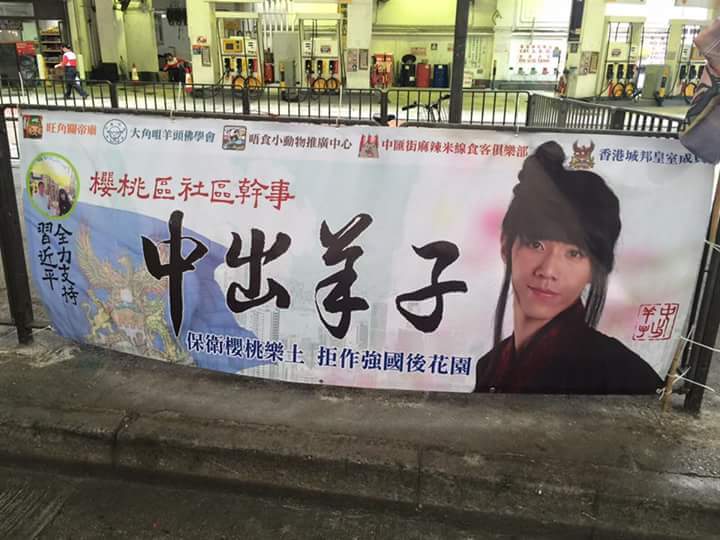
Top: Sponsors: Mong Kok Lord Kwan's Temple; Tai
Kok Tsui Sheep Head Buddhism Society; Don't Eat Small Animals Promotion
Centre; China Street Hot Spicy Rice Noodle Diners Social Club; Hong Kong
City-State Royal Family Members
Middle: Cherry District Community Executive, Nakade Hitsujiko
Left: "Fully support Xi Jinping"
Bottom: "Defend the Cherry paradise, refuse to become the back garden of the
Strong Nation"
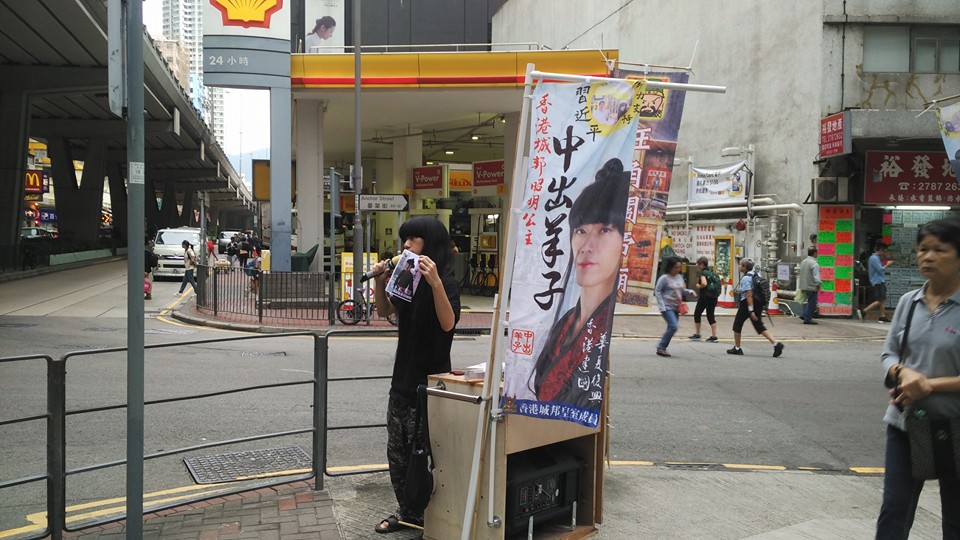
On October 22, the cross-dressing person known
as Nakade Hitsujiko issued a call on Facebook to gather 10 nomination
signatures from Cherry district (in Tai Kok Tsui) residents in order to enter
the District Council elections. The person goes by the nickname of Princess
Chiu Ming of the Hong Kong City-State.
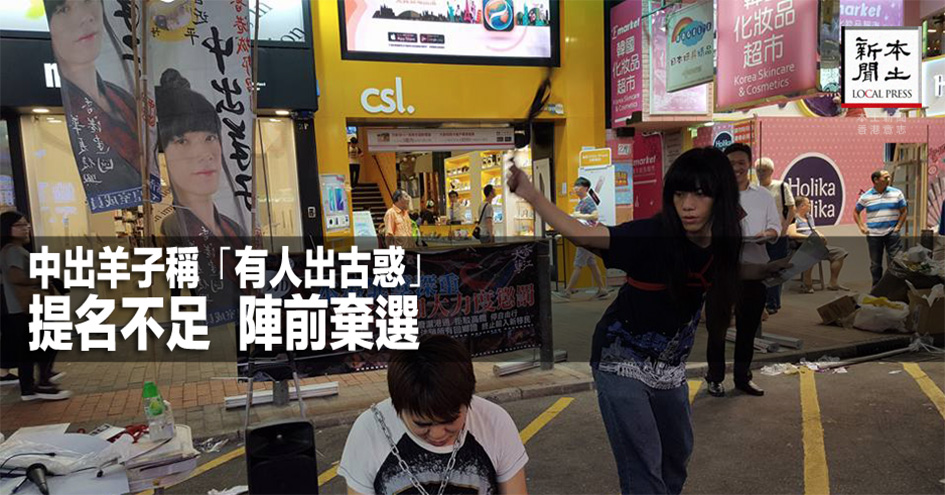
Previously, this person had set up a street
booth on Sai Yeung Choi Street South to solicit campaign donations. The SM act
has the person flogging another person (Yeung Wai-yip, the Empress' Brother in
the Hong Kong City-State) in chains. However, all this has fallen apart.

"Important announcement: The celestial soldiers
and generals did not arrive. I don't have enough nomination signatures. I am
out of the election. They conned me to come to Cherry but they can't even do
something so simple. Xi Jinping, you get ready to blow up. I don't care. After
finishing the accounting tonight, I will refund the money left back to the
donors in proportion."

"I repeat: Someone pulled a stunt so that all
the nomination signatures were voided. I am out of the election. On
reflection, I have nothing to be ashamed of. I am just too gullible. I got
conned because I don't know about the evil in men. I am going into hiding.
Don't bother to find me. When I finish the clear-up, I will re-surface and
clear up the accounts."
Here is a recap: A candidate needs to deposit $3,000 and gather 10 signatures
from registered voters in the same district (not outside). Nakade Hitsujiko
lives in Tai Kok Tsui, but the people who work in his building live elsewhere.
Given the way he looks, not many people in the street would nominate him.
Therefore he has trouble obtaining the 10 signatures. Someone promised him to
take care of it. He trusted that person, but it turns out that the 10
signatures were all voided. Therefore he was out.
P.S. (Ming
Pao) October 15, 2015.
Nakade Hitsujiko has just announced that he received a new nomination from
from a "mysterious concerned City-State citizen" wherein all the names have
been authenticated. Therefore, he is formally in the District Council
elections.
(Oriental
Daily) October 21, 2015.
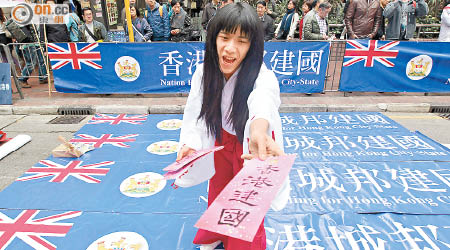
Yesterday Nakade Hitsujiko re-posted an email
from the Registration and Electoral Office that, after seeking legal advice,
they believed that the platform of this candidate contains the slogan
"Nation building in Hong Kong" is basically in conflict with
Hong Kong Basic Law Article 1: "The Hong Kong Special Administrative
Region is an inalienable part of the People's Republic of China." Election
candidates have to swear that they support the Basic Law as well as swear
allegiance to the Hong Kong Special Administrative Region. Therefore, the
REO requested Nakade Hitsujiko to delete this statement himself or else it
will be removed by the REO.
Nakade Hitsujiko responded that he does not
believe the two are in conflict and if the REO removes the statement, he
will seek legal aid to file a judicial review.
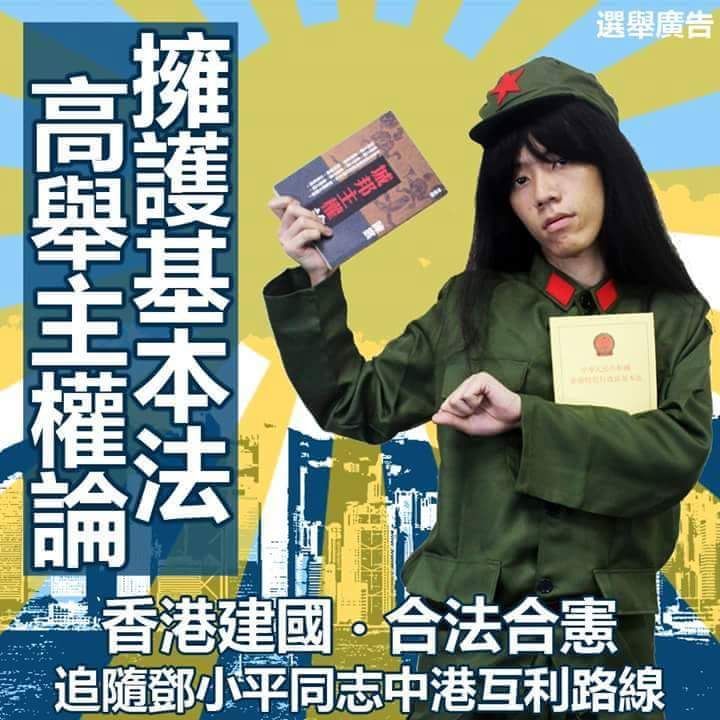
(Election campaign poster)
Defend Basic Law, Uphold Sovereignty
Hong Kong Nation Building, acceptable under the law and the constitution
Follow Comrade Deng Xiaoping's route for China and Hong Kong to benefit each
other
(Wen
Wei Po) October 27, 2015.
In July this year, Lingnan
University assistant professor Wan Chin had announced that the
pro-independence pro-valiant-action Hong Kong City-State group will field five
to six candidates in the District Elections so as to let "flowers bloom
everywhere." Although the Grand Teacher of the City-State issued that call,
few followers were able to acquire the minimum ten voter signatures to enter.
By the deadline on October 15, only two City-State candidates were entered.
Afterwards, one candidate (Yeung Wai-yip also known as the Brother-in-Law of
the City-State) turned out to have some invalid signatures and was therefore
barred from the election. This left only the cross-dressing Nakade Hitsujiko
as the sole City-State candidate. Faced with this debacle, even Wan Chin
wasn't boasting.
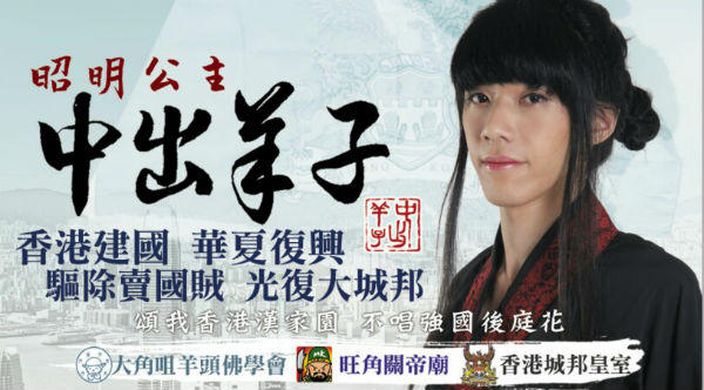
And then there is the ultimate campaign
weapon:
T and A.

SocREC videos:
Part 1,
Part 2.





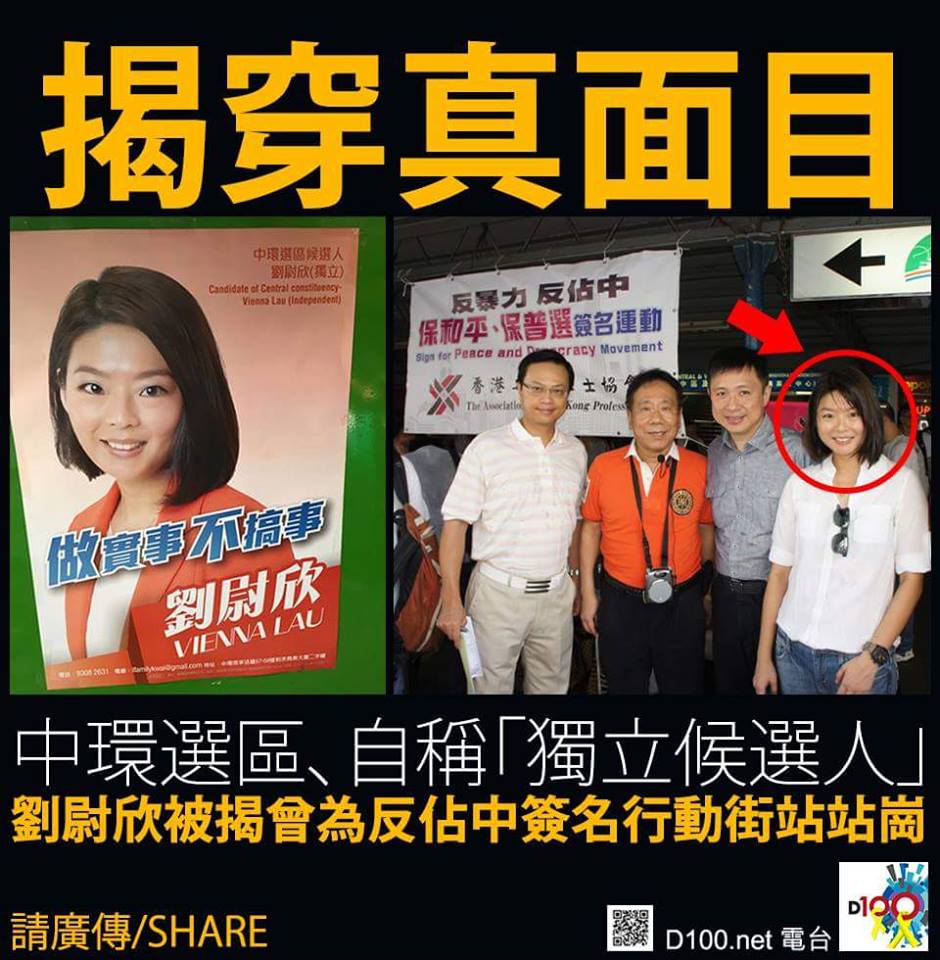
The true face of the so-called "Independent
candidate" in Central, Vienna Lau -- she once worked at the anti-Occupy
Central signature campaign!
Is this good strategy to say that all those who
opposed Occupy Central must be stopped? The polls have consistently shown that
about 50% support the goals of genuine universal suffrage but only 10% want
Occupy Central to continue. You have just shoved the 50% - 10% = 40% into the
enemy camp. This is worse so when Vienna Lau's district is Central. Did you
think the local residents enjoy and support being "occupied" by outsiders?

(Hong
Kong Free Press) October 16, 2015.
As the nomination period of the District
Council election ended on Thursday, 66 constituencies were uncontested.
Pro-Beijing parties secured 35 uncontested seats, with the rest going to
local pro-Beijing groups or independent candidates. None are held by the
pan-democrats.
With the increase of the total number of
seats to 431 from 412 in the last election in 2011, and a record-high 951
nominations, the uncontested constituencies that the pro-Beijing camp
grabbed dropped from 76 to 66. They will be automatically elected if their
nominations were confirmed.
Ultimately, the DAB party claimed 20 seats,
followed by the New PeopleÆs Party, with seven seats, and the Federation of
Trade Unions (FTU) which won six. The Liberal Party were unchallenged in
two. Only two lawmakers, Alice Mak Mei-kuen and Kwok Wai-keung, both of FTU,
were uncontested. Former China Liaison Office top official Wong Chun-pingæs
seat was also uncontested.

(Hong
Kong Free Press) October 22, 2015.
A district council election candidate from
a localist group has decided to withdraw from the race, as it has been
revealed he joined a group supporting Chief Executive Leung Chun-ying which
attacked protesters who were not in favour of Leung in 2013.
Ho Wai-cheung is a Lingnan University
student who was a member of the Tuen Mun Community Concern Group running in
Fu Tai constituency in Tuen Mun. In a statement, he said he did not want to
hurt anyone. ôI was instigated by friends to start conflicts with protesters
in the 2013 protest against Leung Chun-ying in Tin Shui Wai, but I must
stress that I did not attempt, nor have the intention, to harm anybody.ö
ôIn fact, I was a young person with no
knowledge in politics. I only wanted to help a friend, I did not think it
over and made such a mistake,ö Ho said, adding, ôI give my most sincere
apology to all the related people.ö
His involvement with the group of masked
people was first discovered by netizens on HKGolden forum on Wednesday
night. Back in 2013, after the Tin Shui Wai incident, Apple Daily reported
that the masked people involved were from triad groups.
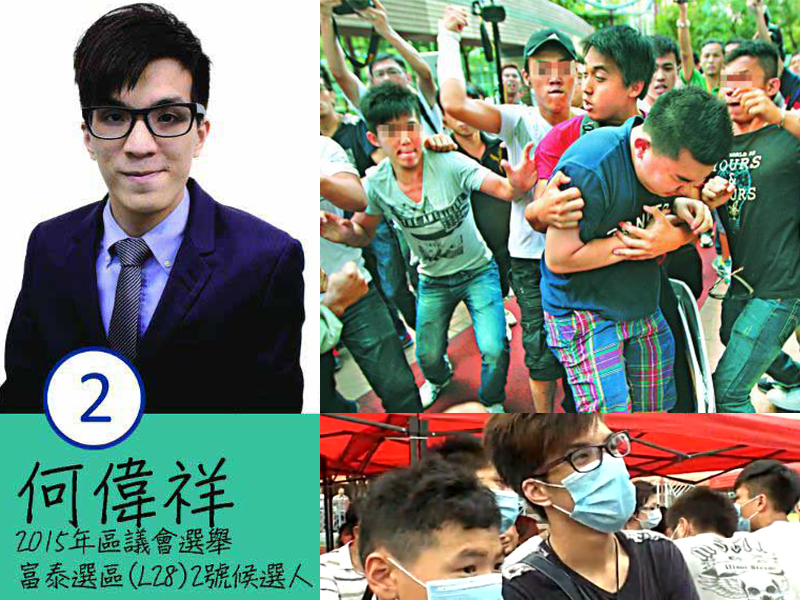
Ho said he joined a student organisation
last December to learn more about politics and change himself. He decided to
join the district council elections to ôcorrect past mistakes.ö
He had published articles online as a
Scholarism member. He also joined the Tuen Mun Community Concern Group after
it was started in December 2014. ôBut I only realised now that I have not
done enough à To show my sincerity, I am willing to withdraw from district
council election activities, and resign from the Tuen Mun Community Concern
Group, I wish to serve the residents wholeheartedly in the future, to show I
am willing to turn over a new leaf.ö
Tuen Mun Community Concern Group also
issued a statement apologising for the incident. ôWe admit that due to
insufficient election preparation time, we have not been able to investigate
the background of some of our candidates, which has caused unnecessary
speculation and misunderstanding. We apologise for that,ö the group said.
(Hong
Kong Free Press) October 23, 2015.
A member of a localist group, who is
running for a District Council seat in Tuen Mun in the Nov. 22 elections,
was found to be among a group of masked men who attacked pro-democracy
protesters during a visit by Chief Executive Leung Chun-ying to Tin Shui Wai
in 2013, Apple Daily reported on Friday.
Ho Wai-chueng, a member of the Tuen Mun
Community Concern Group (TMCCG), admitted he was among the group of CY Leung
supporters in the 2013 incident, but stressed that he did not use violence
against anyone or receive any monetary reward for his participation. ôI was
asked to go to an event by friends of mine,ö he said. ôI was only told to
help CY leave the place safely when I arrived.ö
Ho, who is running for a local council seat
in Fu Tai district, said earlier on Thursday he would withdraw from the
elections and quit the TMCCG, but changed his mind later in the day. He said
he was politically naive when he joined the CY Leung supporters in 2013 and
that his participation in the District Council elections was part of his
efforts to change himself. He also said he would not allow his rival Chan
Man-wai to get elected without any competition.
It was also learned that Ho was a member of
the student group Scholarism and was an active participant in last yearÆs
Occupy protests. He said he quit Scholarism in July this year in order to
focus on his studies.
The TMCCG issued a statement apologizing
for its failure to conduct thorough background checks on members running in
the upcoming District Council elections. Hon Lai-yin, the groupÆs
co-founder, said Ho joined the organization in September and never mentioned
that he was involved in the Tin Shui Wai incident in 2013.
The Registration and Electoral Office said
there is no exit mechanism for candidates after the nomination period.
Ho is one of the two candidates in Fu Tai
district, the other being Chan Man-wai of the Hong Kong Federation of Trade
Unions. Chan refused to comment on whether it is appropriate for Ho to pull
out of the race, but said people with violent behavior should not run in any
election.
(Wen
Wei Po) October 25, 2015.
Yesterday Ho Wai-cheung got on an Apple
Daily internet program and said that he was invited by "ball-playing
friends" to "go over to have a chat." When he arrived, he saw that "the
people on his side" were quarrelling with League of Social Democrats
chairman Leung Kwok-hung and realized that he was summoned to "support CY
Leung." He wanted to leave but he "was prevented from doing so." He said
that someone was handing out money at the scene. He said that he was "sold
out" and "ambushed."
Ho Wai-cheung described himself as if he
was just a passerby at the time. But netizens said that the newspaper photos
showed that Ho Wai-cheung wore black clothes and surgical mask just like the
other assailants. Therefore he could not possibly be as "innocent" as he
claims.

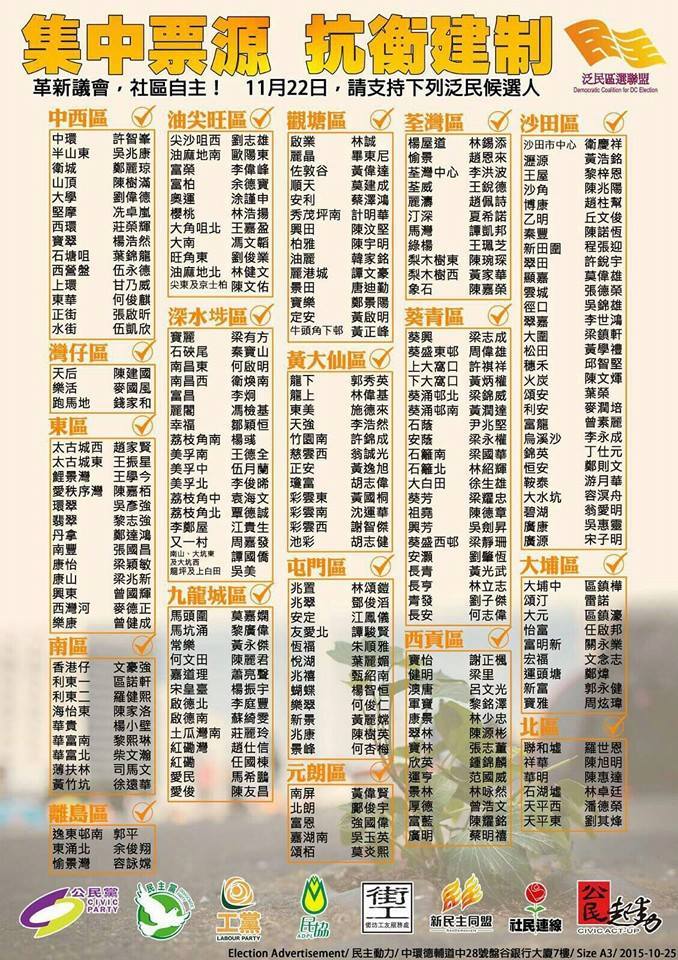
The Democratic Coalition for District Council
Election has vetted the candidates and came up with an endorsed list of
pan-democratic candidates. These are the people that you must NOT vote for. If
they get elected, they will OCCUPY your district and filibuster the District
Councils to make sure that nothing ever gets accomplished in order to prove
that the Hong Kong Communist government is oppressing the people of Hong Kong.

(Hong
Kong Free Press) October 26, 2015.
At
least 88 of the 384 independent candidates in the District Council elections
on Nov. 22 were found to be members of active associations close to the
pro-establishment camp, Ming Pao Daily reported on Monday.
An
investigative team from the newspaper found that 66 of the 88 candidates
came from three associations controlled by the pro-establishment camp,
namely the Hong Kong Island Federation (HKIF), Kowloon Federation of
Associations (KFA) and New Territories Association of Societies (NTAS).
NTAS chairman Leung Chi-cheung confirmed
that it is supporting 161 candidates in the District Council (DC) elections,
second only to the Democratic Alliance for the Betterment and Progress of
Hong Kong, which is fielding 171 candidates.
However, only five candidates have revealed
they are backed by NTAS.
The Registration and Electoral Office said
DC candidates are not required by law to disclose their political
affiliations, but they can opt to release such information for the
information of the public. The REO has not replied when asked about its
definition of political affiliations.
Bunny Chan Chung-bun, who is running for
the Hip Hong district of Kwun Tong, is a Hong Kong deputy to the National
PeopleÆs Congress, chairman of KFA, honorary chairman of the Federation of
Hong Kong Guangdong Community Organizations (FHKGCO), and chairman of a
group he founded. Chan said KFA and FHKGCO are not political groups, while
the group he founded is not a party, but an independent platform for
legislative and district councilors.
HKIF president Choi Ngai said he could not
comment as he is not well-versed with the issue.
Of the 66 candidates affiliated with
pro-establishment groups, 16
were unopposed while 78 percent of the remaining 50 candidates are competing
with those from the pan-democratic camp, the report said.

(Hong
Kong Free Press) November 19, 2015.
Activists from Hong KongÆs pro-democracy
Umbrella Movement will be vying for seats at key local elections this
weekend ù the first real test of public sentiment after mass protests
gripped the city last year.
Dubbed ôUmbrella soldiersö by local media,
the campaigners have set their sights on the district-level polls, the first
elections since the pro-democracy rallies brought parts of the city to a
standstill for more than two months. The protests failed to win concessions
from Beijing or the Hong Kong government on political reform and activists
now hope launching into local politics will prove a more successful
strategy.
ôThe elections are considered to be a
bellwether this year,ö says Willy Lam, professor at the Chinese University
of Hong KongÆs Centre for China Studies. ôBeijing, Hong Kong and the
international community are watching very closely to see whether the mass
enthusiasm for democracy galvanised during the Umbrella Movement will bear
fruit in the ballot box.ö
Hong Kong is semi-autonomous after being
handed back to China by Britain in 1997, but there are fears its freedoms
are being eroded by Beijing. Last yearÆs rallies were sparked after Beijing
insisted that candidates for Hong KongÆs next leader must be vetted by a
loyalist committee.
Yau Wai-ching, 24, is a former
pro-democracy protester and one of nine members of new group Youngspiration
standing in the district vote. ôI canÆt accept that now the movement has
ended there is nothing we can do,ö says Yau, who quit her job as an
administrator to run for office. ôWe are Hongkongers. We are not
politicians. We are coming out to do something we think is right.ö
However, with scant experience and
resources, and with the democracy movement splintering, there are questions
over how far they will get.
There are also fears the new generation
will split the democratic vote as they are competing with members of more
established pro-democracy parties in some constituencies. But young
campaigners say it is an important step as they try to reignite the
movement.
ôEven if they lose (in the district
elections), I hope the umbrella soldiers can continue their effort and
passion,ö Joshua Wong, the teenage face of the democracy movement, told AFP.
At 19, Wong is too young to stand as candidates must be 21 ù he has launched
a judicial review to bring the age restriction down to 18. ôIt is possible
to motivate youth and teens after the movement. ItÆs not an easy thing to
do. But I still have expectations,ö says Wong.
Voters will choose 431 representatives for
the 18 district councils ù currently pro-establishment parties hold a
majority.
With the city deeply divided between those
who favour more democratisation and those who support Beijing,
pro-government candidates are casting themselves as a force for stability,
in contrast with democracy campaigners who they blame for disrupting life in
the city.
ôWe would like to get a comprehensive
victory,ö said Tang Ka-piu, a candidate for the Federation of Trade Unions,
a major pro-Beijing group. ôThis will be a message that mainstream society
wants stability,ö he adds. ôWe need to demonstrateà who is really doing good
for Hong Kong.ö
Although pro-democracy lawmakers succeeded
in voting down the Beijing-backed reform bill that sparked last yearÆs
protests, their failure to win concessions has led to a sense of
hopelessness for some. ôEven if we elected democrats they wouldnÆt have
enough power (to accomplish their goals) as they are suppressedà the city is
now part of China,ö says Lun Hon-hung, 68, who runs a name card business and
says he will not vote.
But others remain more optimistic. ôWe need
to make our voices heard,ö said 28-year-old resident Sam Wong, who said she
would vote on Sunday. ôHopefully through voting we can still fight for
democracy.ö

(Ming
Pao) October 2, 2015.
Last November after the Occupy
Mong Kok site was cleared by the police, certain Occupy participants began to
assemble in Mong Kok for the Shopping Revolution ostensibly in response to
Chief Executive CY Leung's call to "support businesses by shopping." They
raised yellow umbrellas and banners and they roamed around Nathan Road to play
catch with the police. One year later, the Shopping Revolutionaries are no
longer what they were. To observers, they have changed qualitatively. A
Revolutionary said: "In reality, the method has indeed changed but it is
conceptually the same."
At
4pm on September 19 (Saturday) in Sai Yeung Choi Street South (Mong Kok),
58=year=old Mr. Yeung set up his public address system together with some
yellow umbrellas. He began to narrate certain familiar news topics. A man
walked by and wanted to debate Yeung. But several of Yeung's fellow
travelers rushed up and made the man felt "pointless" and left. Mr. Yeung
explained. "We are not gentlemen. When we encounter opposition, we will not
be passive!" Mr. Yeung is semi-retired, and he spends several days in the
week to stand there and deliver speeches.
On the last day of Occupy Mong Kok, a teenager
carrying an umbrella in hand and wearing a foam rubber board on his forearm
told the reporters: "This is the last day of Occupy. We will hold up." But
in the end, those who held up the longest are a bunch of middle-aged and
elderly people. Mr. Yeung said: "I am angry every day. Therefore I
propagandize (Occupy) every day."
Another hardcore Shopping Revolutionary is
79-year-old Uncle Ng. After he retired, he became a regular Shopping
Revolutionary. Uncle Ng said that whenever there are important social
incidents such as a Shopping Revolutionary getting arrested, he would come
out from his Wong Ta Sin home to government headquarters, the Legislative
Council building or the police station to offer support. Every day after he
participates in the Shopping Revolution, he would post the day's happenings
onto his Facebook. From the day that Occupy Central was declared, Uncle Ng
has been staying in the Occupy area. At night, he slept on Cheung Sha
Street. When it got cold, he walked and sat in the area at night. On the
last days of Occupy Admiralty and Occupy Causeway Bay, he "sat down
deliberately" in order to await arrest.
It has been almost 300 days of the Shopping
Revolution. Uncle Ng has been in Mong Kok almost every day to carry an
umbrella. He is even busier than a young worker. "There is no reason not to
support this, because it benefits all of the people of Hong Kong. It
is a good thing ... I am old. Will I be arrested? Will I be injured?
Sometimes I am worried. But I am not worried now. I am not worried. I can
take a lot. I can stand 12 hours straight without sitting ..."
Last November after Occupy Mong Kok ended, a
number of young demonstrators were in the Shopping Revolution. A large
number of people walked onto the roadway and said that they were trying to
pick up loose change. Sometimes they went over to the Chiu Luen minibus stop
to protest and curse. Sometimes they stood outside the Broadway Cinema and
sing the adapted song "I
go to the Shopping Revolution every day, I respectfully reject your
monitoring ..." They even tried to claim to want to march down to
Tsim Sha Tsui and played catch with the police all night.
Everything came and went quickly. Suddenly
things quieted down. From the several hundred people at first, there are now
only several dozen middle-aged and elderly people left. "I don't have to
work, I don't have to go to school, I can come out every night. We live long
enough to come out." Uncle Ng said with a smile.
Shopping Revolution core member Ms. Chin said;
"60% to 70% of those Shopping Revolutionaries left are retirees. I estimate
that there are 200 hardcore people left ... Frankly, some young people are
scared after being 'harassed' by the police! They got ID'd and searched.
They are too scared to come out again. Some Valiant Warriors think that we
serve no purpose by just standing around ... they don't agree with what we
are doing ..."
The
student named Lam participated in Occupy Mong Kok for the full 79 days.
After one week of Shopping Revolutionary, he quit because he felt that it
was all over. "At the time, I was looking for a solution. But I found that
it didn't work. It was time to stop. The Shopping Revolution is different
from the Occupy Movement. At the time, we were looking to get bargaining
chips. It didn't work." But he appreciated the determination of the Shopping
Revolutionaries. "Maybe one day the conditions will be ripe for action!" Lam
believes that young people will pour into the streets once more if the
conditions are right.
But many people seem to think that the Shopping Revolutionaries are just a
bunch of people who stand there and yell, and therefore they cannot affect
anything. But the Shopping Revolutionaries think that there is a different
meaning. Mr. Yeung said: "Most people do not need the Shopping Revolution.
But it is only a continuation of the spirit. As long as it does not
extinguish, it's okay." Ms. Chin said: "We won't withdraw from the frontline
unless we really got a genuine universal suffrage, or if we are no longer
able to walk anymore ... street resistance will continue indefinitely."
(East
Week) October 14, 2015 Issue 633.
Sharp-eyed people have noticed
that there is a small group of foreigners among the Shopping
Revolutionaries, and they are even weirder than the Localists. There are
about a dozen or so of these people, mostly foreigners from the United
States and Europe and they are often present at the various demonstrations.
They take videos, add commentary and post them onto various social media,
including a Facebook page called Lost Dutch. Many people actually mistake
them for an Internet media outlet.
Among these people is a 30-something-old Asian
named James. He likes to use his mobile phone to chase after plainclothes
police officers, asking them in English or impure Cantonese: "Are you a
policeman? Why are you not wearing your ID card?" He has confronted
plainclothes policemen many times, cursing them out while his companions
took film. Sometimes his companions also interject from behind the camera.
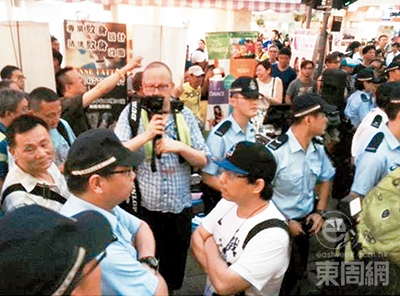
Some people who know James said that he is a
Korean named Fong. Apart from operating an Internet store, he also promotes
Bitcoin. "During the Occupy period, someone asked people to buy Bitcoins
from him and he promised to spent all the profits on buying lunch boxes to
feed the people sleeping int he streets."
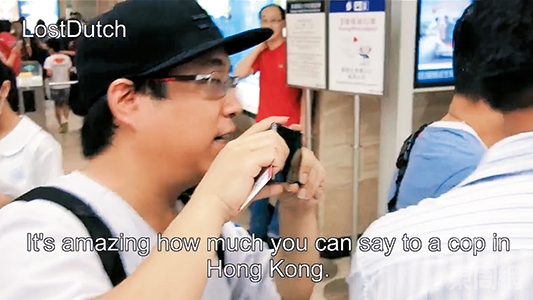
After the Occupy movement ended, James became
part of the Shopping Revolutionary. However, this movement is more limited
and less appealing to foreigners. So James and his companions turned to
harassing the plainclothes policemen for not displaying their ID's. He said:
"It's amazing how much you can say to a cop in Hong Kong." However, some
Internet users questioned the purpose of these actions, and so James is less
popular now (just as Bitcoin).
Videos:
(Apple Daily)
https://www.youtube.com/watch?v=6lZO5QOZFuI Uncle Ng on Day 311 of
the Shopping Revolution
Internet comments:
- If these retirees have time on
hand, they could spend it better by working as volunteers to help people in
need.
It is better to give than to receive. This is the way to contribute to
society.
Joining the Shopping Revolution?
The politicos won't even say thanks for serving their political goals. They
will only smirk at your foolishness.
So far you have only angered everybody else.
You say that you are doing this for all the people of Hong Kong.
But you are only using this as an excuse for your own ridiculous tantrum.
You are rubbish!
- At
least the retirees have something to do. It is better than sitting around
and waiting to die.
-
Uncle Ng has so much time on hand because he is a social welfare recipient.
He takes government money so that he can overthrow the government.
- No, you completely misunderstand. Uncle Ng is working for genuine
universal suffrage. When that comes, the people of Hong Kong will elect a
government that will increase social welfare payments by taxing the rich
heavily. That is the main point of genuine universal suffrage.
- The young wastrels of the Umbrella
Revolution told the old farts to bugger off and not block their way to
genuine universal suffrage. But in the end, only the old farts are left to
carry on.
- Economics
101: Retirees cost a lot less to hire than triad gang members. The
bankroller is trying to conserve his stash after burning several hundred
million dollars on Occupy.
- The photo of Ms. Chin, a core member of the
Shopping Revolution:
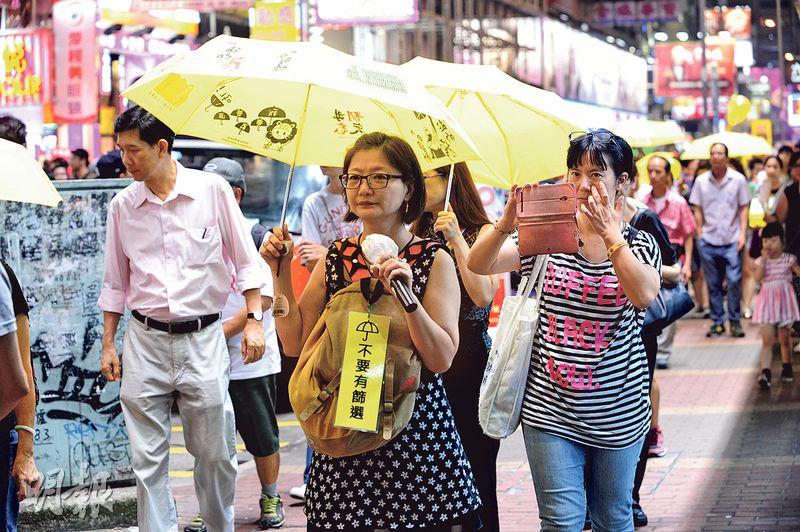
What is the purpose of all the effort? The ad below showed that Chin Po-fun
is looking for citizens to nominate her in the District Council elections.
If you are a resident of Yau Oi (South) in Tuen Mun and you want to nominate her, please contact Legislator Chan Wai-yip (League
of Social Democrats). All of a sudden, she is no longer a raving and ranting
maniac. Instead she is now packaged as a well-coiffeured candidate in a pink
dress suit (see
YouTube) working for people's livelihood instead of destroying it.
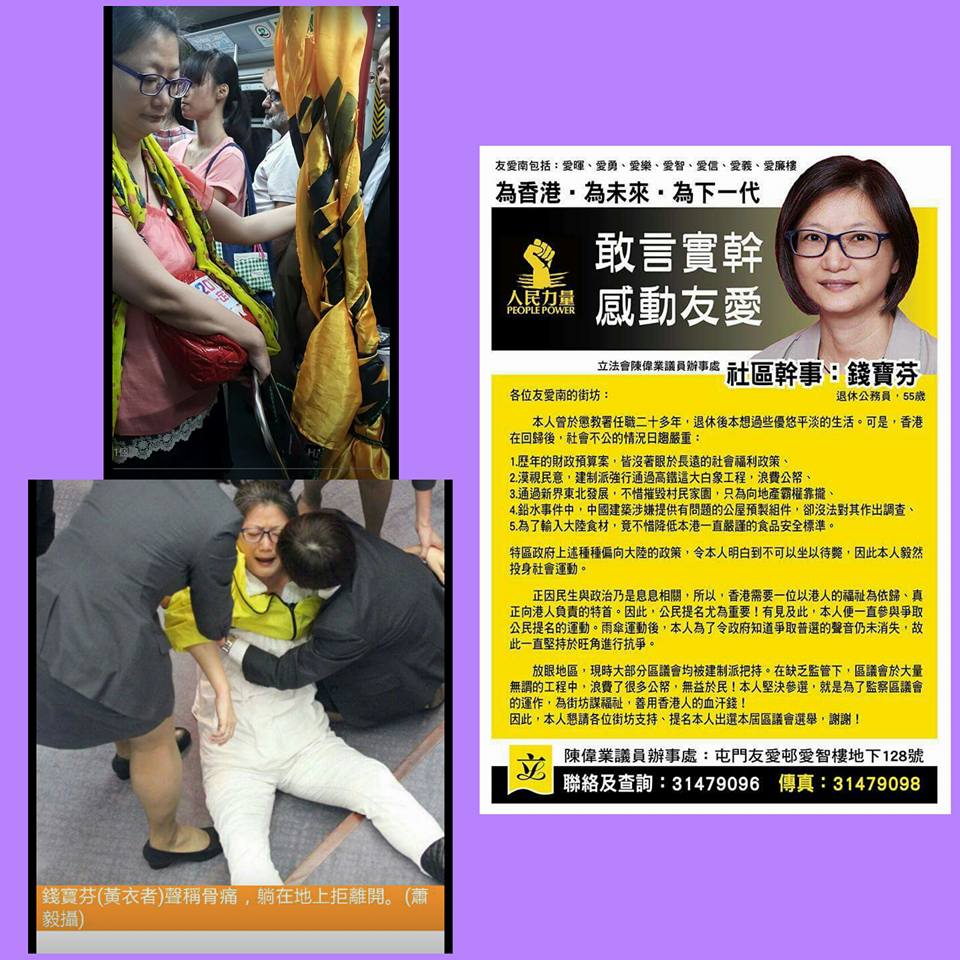
The bottom left photo shows Chin Po-fun being
ejected for disrupting a Legco hearing and refusing to leave by claiming
bone aches (see
Oriental Daily, May 23, 2015)
- (HKG
Pao) At the campaign kickoff meeting, Chin Po-fun denounced the
government for ignoring livelihood issues and wasting public money. So she
says that same thing as Chan Wai-yip. However, she had nothing to say about
the livelihood issues in the Yau Oi South district. She did not describe her
platform for people's livelihood. She kept reiterating worn-out issues such
as "monitoring the government; I want genuine universal suffrage; civil
nomination." Residents wondered if Chin is unfamiliar with the Yau
Oi South district and didn't care either. Chin's Facebook contained contents
related mostly to Occupy Central and the Shopping Revolution with little or
no personal background information. On this morning, she deleted her
Facebook on the grounds that Internet promotion is not allowed during the
campaign. She isn't going to have much of a chance when she refuses to
provide personal background and has no platform for people's livelihood.
- P.S. After losing the district council election,
Chin Po-fun returned to the Shopping Revolution in Mong Kok. She gave a
speech to explain why she lost. Very simply put, she said that she does not
have the temperament to serve the people, so she knew that she would lose
for sure.
https://www.facebook.com/1640482902830291/videos/1669789693232945/
Thanks for wasting everybody's time.
- Some people do this out of sheer boredom.
Other people do it for political ambitions. Is there anyone who thinks that the Shopping Revolution
by 50 senior citizens will actually work? Namely, achieving
the minimum goals of
(1) making the National People's Congress Standing
Committee rescind its August 31st resolution;
(2) making the National
People's Congress Standing Committee, the Hong Kong SAR government and the
Legislative Council come up with a 'genuine' universal suffrage based up on
civil nomination of the Chief Executive candidates;
(3) making CY Leung
resign.
- Of course, it won't work. Even the Shopping Revolutionaries know that.
They only want to let off some steam and annoy people. CY Leung isn't
annoyed because he is perched securely in Government House. The police know that
they are just doing their jobs. The only people who are annoyed are the Sai
Yeung Choi Street South residents who have to put up with people yelling
outside their windows at night, and the business operators who are suffering
economic losses.
- (Resistance
Live Media @YouTube) October 11, 2015. Three men were arrested by
the police at the scene of the Shopping Revolution.
- (Facebook
November 3, 2015) "Four-eyed Brother" Cheng Kam-mun spoke on radio about the
history of the Shopping Revolution. After Occupy Mong Kok was cleared, Chief
Executive CY Leung called for citizens to revive the economy in Mong Kok and
demonstrators showed up for the Shopping Revolution. Cheng said that the
first week of the movement was successful, because they were able to
increase the cost of governance for the government, allow the demonstrators
to express their discontent and draw public attention. Cheng remembered that
the police had to deploy a thousand police officers each night in case the
demonstration became another Occupy Mong Kok.
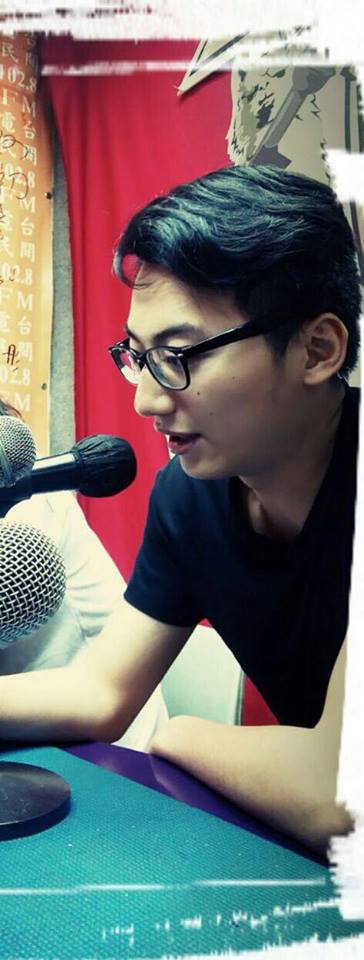
Mong Kok denizen "Bearded Guy" then
recalled what happened next. After one week or so, an auntie carrying a
yellow umbrella showed up. "Later on, we found out that she is Auntie Chin,
a core member of People Power and currently running for Tuen Mun district
councilor." She started the lead the crowd to chant slogans and she barred
the demonstrators from heading towards the Chiu Luen minibus stop. At one
point, "Bearded Guy" suspected that Auntie Chin has an agreement with the
police who provided a designated demonstration route to her. Because the
Shopping Revolution failed to live up to its original purpose, fewer and
fewer
citizens showed up over time. In the end, it became a private activity for Auntie Chin
and a dozen or so individuals. Each night they walk around Nathan Road and
they chant "I want genuine universal suffrage" and other
slogans. Nowadays Auntie Chin does not show up anymore because she is busy
running for election. So the so-called Shopping Revolution is alive only in
name.
(dbc)
October 1, 2015.
More than 10 People Power
members gathered this afternoon near Star Ferry (TST) to commemorate those who
perished in the Lamma Island ferry disaster. They raised banners that read
"Commemorate the dead, resist tyranny" and they chanted slogans such as "It is
no crime to commemorate the dead." They also set fire to the Chinese national
flag. The participants engaged in a minute of silence with some of them holding
up yellow umbrellas. People Power legislator Chan Chi-chuen said that People
Power wants to cancel the national day fireworks show permanently.
(Oriental
Daily) October 2, 2015.
About 50 League of Social
Democrats and Chinese Democracy College members marched from the Western
District Police Station to the China Liaison Office to hold three minutes of
silence for the dead in the June 4th 1989 movement and the late mainland
democracy activist Li Wang-yang. League of Social Democrats member Koo
Sze Yiu attempted to pick up the coffin prop and toss it inside the China
Liaison Office, but the police stopped him. Social activist Lui Yuk-lin tried
to set fire to a Chinese Communist flag but the police doused water to put out
the fire.
Meanwhile
another 30 people of the Tiananmen Mothers Movement including League of
Social Democrats legislator Leung Kwok-hung, Alliance to Support Democratic
Patriotic Movements in China's current chairman Albert Ho and former
chairman Lee Cheuk-yan marched earlier in the morning from the Western
District Police Station to the China Liaison Office. They held banners and
wreaths, and demanded that the June 4th movement be vindicated. They placed
the wreaths outside the China Liaison Office and bowed to the wreaths.
Several counter-demonstrators showed up and demanded Lee Cheuk-yan and
others to "pay the bill" (in reference to accepting responsibility for
Occupy Central). The police separated the two sides. Eventually they all
dispersed peacefully.
(Oriental
Daily with video) October 2, 2015.
League of Social Democrats
legislator Leung Kwok-hung and about 20 persons set out from the Family
Planning Council in Wanchai towards the site where the national day flag
ceremony was to be held. They carried a coffin and flower wreaths and they
chanted slogans to demand the vindication of the June 4th 1989 movement. They
clashed with a group of Localists who carried banners that say "Hong Kong
Independence" and "I am not Chinese." These Localists cursed out Leung and
company for being "off the ground." Meanwhile regular demonstrators Andy
"Captain America" Yung and others waved their British Dragon/Lion colonial
flags for Hong Kong independence.
(Wen
Wei Po) October 1, 2015.
Civic Passion cadre Cheng
Chung-tai led a group of ten or so radical Localists towards the Convention
Centre. The police on duty stopped them from approaching the Golden Bauhinia
Plaza. So Cheng and company set up a stage on an empty lot near the
intersection of Convention Avenue and Fleming Road and started yelling.
Several City-State members waved the British Dragon/Lion colonial flags and
showed Hong Kong independence banners. Hong Kong Indigenous cadre Ray Wong
also put in an appearance. Meanwhile across the street from the Convention
Centre, Hong Kong Localism Power cadres CK Ho and Simon Sin yelled at
passersby by megaphone. League of Social Democrats legislator Leung Kwok-hung
brought more than 10 persons to try to approach the Golden Bauhinia Plaza, but
they were also stopped by the police.
Videos:
SocREC
https://www.youtube.com/watch?v=dUiZz08QNUY Awful rendition of "Do you
hear the people singing?" led by Civic Party legislator Kwok Ka-ki
SocREC
https://www.youtube.com/watch?v=uRVmAVRuXSM League of Social Democrats
march towards Golden Bauhinia Plaza
SocREC
https://www.youtube.com/watch?v=cEKctZA-Gqk CK Ho chanting "I am not a
Chinese person" and "Hong Kong is already a nation"
SocREC
https://www.youtube.com/watch?v=6ccHVX7K3IU Cheng Chung-tai (Civic
Passion) gives a speech
Resistance Live Media
https://www.youtube.com/watch?v=zCNdY-fbgXA People Power commemorate
the ferry disaster victims by chanting "Bring down the Communist Party" and
burning an imitation Chinese national flag
Internet comments:
- How do the number of
demonstrators compare against a benchmark as reported on the front page of
Sing Tao --- Headline: "270,000 forgot their worries and enjoyed the fireworks on both
sides of the harbor"?
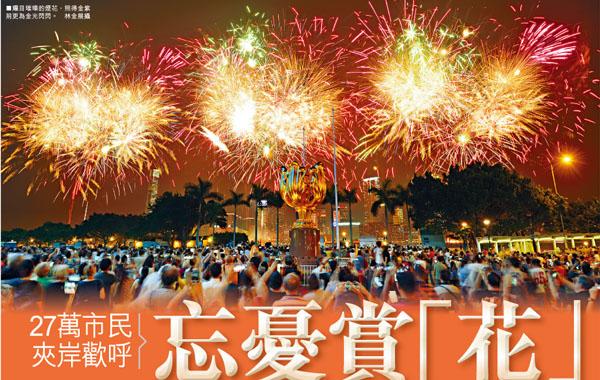
- (Wen
Wei Po) 31,829 were present at the Sha Tin Horse Racing Course on
National Day.
- They are not Chinese, but they didn't mind taking the Chinese National Day
holiday. Why aren't they working on a Thursday?
- You are not a Chinese person. Okay, so what
are you then? I can't tell because you have hidden your face (cap,
sunglasses and ski masks on a hot day). How do you expect me to ever support
a man who won't show me his face? P.S. Is he missing four fingers on his
right hand?
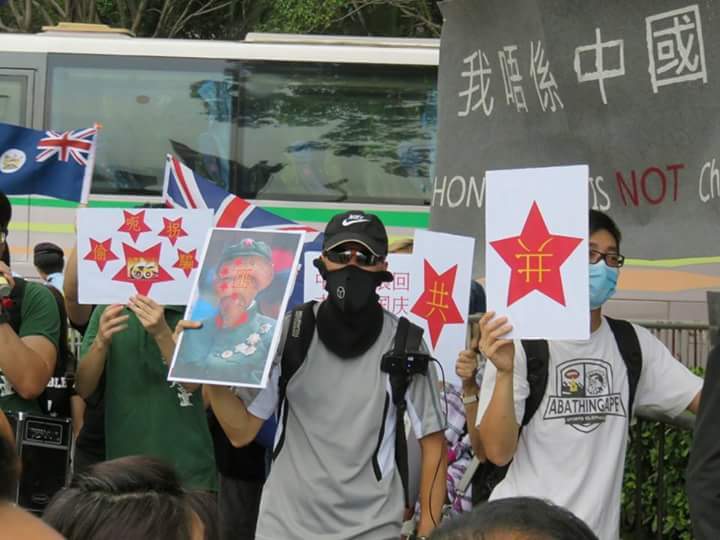
- The message from this banner is perplexing
in three ways.
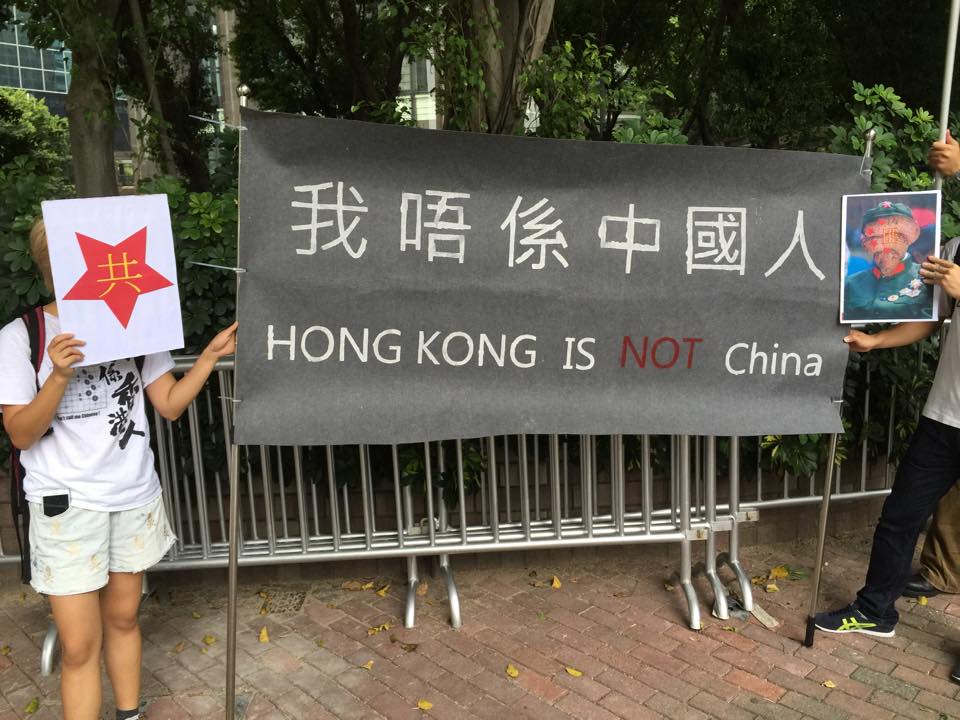
Firstly, the Chinese phrase is translated
directly as "I am not a Chinese person." That is a negative statement, which
naturally leads to the question: "So what are you? Pakistani? Filipino?
Korean?" This banner does not provide an answer.
Methinks that they want to
say: "I am a Hongkonger." I think just about every Hong Kong citizen
of any political persuasion will
agree with the statement "I am a Hongkonger." So that serves no purpose.
Methinks that they really want to say: "I am a Hong Kong person and/but I am
not a Chinese person." This is going to raise many more questions about the
meaning of "I am not a Chinese person":
Do you mean that you come from a
different genetic pool, like the Maoris versus the British in New Zealand or
the American Indians versus the white Europeans in USA?
Do you speak/write a completely different language (that is, does your
Cantonese dialect not come from the city of Canton (=Guangzhou) in Guangdong
province, People's Republic of China?)?
Do you have different
cultural traditions (for example, you don't have the Chinese New Year,
Dragon Boat Festival, Ching Ming festival, Mid-Autumn Festival, Chung Yeung
Festival, rice
dumplings, carrot cakes, moon cakes, hairy crabs, etc)? Are your
holidays Hanukkah, Epiphany, All Souls Day, Armistice Day, St Patrick's Day,
Yom Kippur, Bastille Day and Martin Luther King Jr Day?
What is your citizenship/nationality as stated
in your passport (the HKSAR passport is issued by the People's Republic of
China, while a BNO passport does not confer UK citizenship)? and your ID
card (also issued by the People's Republic of China's Hong Kong Special
Administrative Region government)?
Secondly, the English phrase is "Hong Kong Is
Not China." I checked the map:

This statement is true: Hong Kong is just one little black dot whereas China is the
big yellow chunk in the middle. In the same way, New York City is not the
United States, Osaka is not Japan, Marseilles is not France, Perth is not
Australia, Manchester is not England, Hamburg is not Germany, Milan is not
Italy, etc. But what is the purpose of saying so?
Thirdly, the Chinese phrase and the English
phrase do not match each other. Why, oh why? I know the answer. It means
that you have to employ double-speak to the Chinese- and English- readers
because you have a problem with saying the same thing.
The problems with this banner reflect the
bigger problem of the lack of a grand narrative for an independent and
sovereign Hong Kong that makes sense.
- Here is a simple test: Ask them who issued
their Hong Kong ID? It is the People's Republic of China's Hong Kong Special
Administration Region. If they don't have an ID, they are breaking the law.
- Hong Kong Localism Power's CK
Ho declared that Hong Kong is already a nation. As a nation, taxes can be
raised from the people. So please send in your checks to government
headquarters at Hong Kong Localism Cultural Company Limited, Portland Street
Number 280, Mong Kok, Kowloon c/o East Asia Bank account number 015-515-68-?????-?.
(Wen
Wei Po) September 27, 2015.
A 200-day-plus chronology of the
Johannes Chan affair.
January: The Research Assessment Exercise that was conducted by more
than 300 international-class scholars evaluated the research articles of 4,400
Hong Kong scholars. Hong Kong University's School of Law had only 46% of its
articles rated "excellent" or "world-leading" whereas the 10-year-old Chinese
University of Hong Kong's School of Law was 18% ahead. The former Faculty of
Law dean Johannes Chan was ridiculed by Internet users for "successfully
degrading the HKU Faculty of Law." Johannes Chan
counter-attacked and said that all criticisms of his RAE problems are
"political oppression" because he is reported to be a candidate for pro
vice-chancellor. Some media agreed with Chan's viewpoint and characterized
the criticisms as "political oppression."
February: Unidentified parties told the
media that Johannes Chan was recommended unanimously by the selection
committee headed by HKU president Peter Mathieson as the vice
pro-chancellor. At the same time, these parties also said that the Hong Kong
SAR Chief Executive CY Leung applied pressure on the HKU Council members to
thwart the appointment of Johannes Chan. A member of the selection committee
was interviewed by other media, and said that the committee has made no
recommendations yet. The Chief Executive's office also issued a strong
denial. Other HKU Council members also said that they have never been under
any pressure. They thought that the leaker must have ulterior motives to
pass out such erroneous information. Although nobody ever emerged to
substantiate the media stories and no evidence was ever produced, the
pro-democratic legislators and certain media insists that the autonomy of
HKU has been "politically interfered with" and they want to exercise the
special Legco powers to investigate government interference. They also
demanded HKU explain the pro vice- chancellor selection process and to
immediately appoint Johannes Chan to that position. Meanwhile Johannes Chan
tried to deflect attention on himself and proposed that the Chief Executive
should not serve as the university chancellor in accordance with the law.
March: With questions being raised
about Johannes Chan's academic leadership and a report on the "secret
donations" being due, he was at risk of losing out. So certain media
polled the various deans of HKU schools and finally came up with four school
deans praising Johannes Chan. Although HKU president Peter Mathieson said
that there was no government pressure on the appointment of the pro vice
chancellor and that his personal conversations with the Chief Executive did
not broach this topic, some groups are still demanding the amendment of the
university ordinance which automatically makes the Chief Executive the
chancellor at all eight universities. In addition, the appointment of
Executive Council member Arthur Li to the HKU University Council was taken
as proof that he was interfering with the appointment of Johannes Chan and
that the pro-establishment camp was affecting autonomy at the university. At
the end of the month came the report on the "secret donations." Certain media
said that the report said that Johannes Chan did not break any regulations
and therefore this should not affect this appointment as pro vice
chancellor. But the report clearly stated that there were problems with how
Johannes Chan handled the money, and his conduct was said "not to meet the
expected standards" of a senior administrator at the university. During the
regular March meeting of the University Council, there was no discussion
about the pro vice chancellor position because the selection committee has
not yet made it recommendations. Certain media reported that "the University
Council was stalling on the appointment of the vice pro chancellor."
April: Hong Kong University Surgery
Department director Lo Chung-mau was elected by the staff to represent them
in the Council. However, the opposition said that this conclusively proved
that the University Council is now populated with CY Leung fans. The
Professional Teachers Union once again called for amending the university
ordinance so that the Chief Executive is no longer the chancellor of the
eight universities.
May: At the time when Johannes Chan was the Dean of the Faculty of Law,
he took $300,000 in donations to the Law School via Occupy Central Trio
member Benny Tai. He did not follow procedure and report the name of the
donor. The school had to ask Benny Tai. Johannes Chan's conduct was said not
to meet the expected standards of the university.
The opposition now mounted a defense offered
by Johannes Chan and Benny Tai, namely that there are no expected
standards as such at Hong Kong University and therefore this is making up
charges against them.
June: Former Ming Pao
chief editor Kevin Lau wrote in an opinion column in Ming Pao that Johannes
Chan applied for the pro vice chancellor position after being persuaded by HKU
Council chairman Leong Chu-hung. Lau said that Chan was supposed to be
promoted to that position in March, but his appointment was stalled. The
opposition promoted this allegation to apply pressure on Leong Che-hung and
the council to make the appointment. But the facts were that Johannes Chan's
secret donation issue is unresolved and the selection committee has not made
any recommendations. But the opposition didn't care and continued to say that
the Council was stalling on Chan's appointment. On June 30, the "secret
donations" report came out. The investigation committee said that Chan and Tai
acted in a manner that does not meet expectations and they recommended the
university to take action. At the Council meeting, university president Peter Mathieson said that the provost will be arriving in August and so the council
voted 12-to-6 to postpone the appointment of the pro vice chancellor until the
provost arrives. The opposition protested against the delay and threatened to use the special
powers of the Legislative Council to investigate the matter.
July: The opposition said that it was
unreasonable to wait for the provost. The HKU Alumni Concern Group conducted
various activities such as gathering signatures, holding press conferences,
and
publishing statements to demand that HKU make the appointment. Former Ming
Pao chief editor Kevin Lau published an article just before the July meeting
of the Council that "the pro-establishment camp led by Arthur Li and Leong
Che-hung" asked a middleman to persuade Johannes Chan to withdraw his
candidacy.
On the day of
the July meeting, several dozen HKU students and several radicals
unconnected to Hong Kong University charged into the conference room and
applied pressure on the council members. Lo Chung-mau fell down on the
ground injured. Ayasha Macpherson felt ill after being surrounded and not
allowed to leave. The two were taken to the hospital by ambulance. Arthur Li
was surrounded by students and called "shameless." Afterwards, Johannes Chan
told the investigating press that Arthur Li has never sent anyone to get him
to withdraw.
August:
The assault was regarded negatively by society and that was unfavorable to
Johannes Chan's candidacy. But Johannes Chan disclosed that he had been
"recommended" to become a candidate for pro vice chancellor for academic
staffing and resources. He said that his successful appointment means that
the university still has autonomy and vice versa. The opposition chimed in
to say that failure to appoint Johannes Chan would lead to the
disintegration of civilized society.
On the day of the August meeting, it was noted
that all four candidates for the provost positions have withdrawn in view of
the known situation and so a provost cannot be found in the short time. The
Council decided to discuss the appointment of the pro vice chancellor in its
September meeting. With respect to the "secret donation" affair, the Council
accepted the university senior administrators group's advice to make
recommendations to the various principals. The letter to Johannes Chan
reminds him that as a senior staff member, he has certain duties and
responsibilities which he must not overlook in the future.
September: The HKU Alumni Concern Group
worked through the Convocation to hold a referendum in which several
non-binding motions were passed by more than 7,000 persons, including
demanding the Council to appoint the pro vice chancellor within 30 days.
Although the turnout rate was only 4.8% of the Convocation, the HKU Alumni
Concern Group told the Council that there is a strong public opinion among
the alumni.
In summary,
the opposition has been using seven dirty tricks:
1. They disseminated false information through
the media to portray themselves as being politically suppressed
2. They made false accusations against the
Hong Kong SAR government and the University Council as if these are the
enemies
3. They used
violent force to lay siege to the University Council members
4. They gathered signatures, issued
statements, bought newspapers ads and held press conferences to force the
University Council to appoint Johannes Chan
5. They used the Hong Kong University
Convocation to apply pressure
6. They put HKU president Peter Mathieson in a
bind by saying his governance would vanish if he fails to appoint Johannes
Chan
7. They said that
if Johannes Chan is not appointed, it would mean the disintegration of
civilization.
(Wen
Wei Po) September 28, 2015.
Yesterday, Profession Teachers
Union legislative councilor Ip Kin-yuen held a press conference to release an
open letter to the University Council. The letter contains two demands. The
first demand is for the University Council to makes its appointment of the pro
vice chancellor of academic staffing and resources. The second demand is that
the University Council must provide detailed explanations of their rationales.
Ip said: "The University Council should adhere to the principles of academic
freedom and institutional autonomy while forgetting any political issues. The
University Council members are held responsible for their decision. We
recommend that the vote be conducted by open balloting with all the votes
being written into the record." Of course, this recommendation is inconsistent
with the principle of confidentiality that is in place for the University
Council.
Ip Kin-yuen said
that they don't really care who gets appointed or not, but they want the
University Council members to make the decision in accordance with the
guidelines and rules. He said that he will present a petition at the meeting
and HKU Alumni Concern Group representatives will be outside. A forum will
be held one week later at which point Leong Che-hung will explain the
relevant decision. "As for any other actions, that depends on whether the
explanation of the University Council is reasonable." When asked whether
there will be violence like during the July meeting, Ip Kin-yuen said
that they will use peaceful means to express their views. HKU Student Union
president merely said "Nothing further to add" to avoid answering the
question.
(Ming
Pao) September 28, 2015.
The HKU Council has 21 members.
One of them will be away from Hong Kong. That leaves 20 votes to be cast.
According to the assessment of the HKU Alumni Concern Group, 9 votes (mainly
staff members, teachers and students) support Johannes Chan's appointment. The
pro-establishment side has 10 votes. That makes president Leong Che-hung's
vote critical. If he supports the appointment, the vote will be 10-10 and
further debate will be necessary. If he vetoes the appointment, then the game
is over.
(HKG
Pao) September 29, 2015.
On radio this morning,
legislative councilor Ip Kin-yuen said that it was rare for the University
Council to hold secret balloting, and that it was also rare for the University
Council to reject a candidate recommended by the selection committee. Former HKU Council member Cheung Pok-yin was on the same radio program and pointed
out that during his tenure, controversial issues were usually voted by secret
balloting and not "rare" as Ip asserted.
(HKG
Pao) September 29, 2015.
The HKU Council has 21 members,
of which 8 come from inside (namely, staff members, teachers and students).
One of them will be away from Hong Kong tonight. Of the 8 from inside, 7
(including HKU president Peter Mathieson and School of Physics dean Kwok Sun)
are for and 1 (Surgery Department director Lo Chung-mau) is opposed. Of the 12
from outside, all are opposed. So the writing is on the wall not to appoint
Johannes Chan as the pro vice chancellor.
(Oriental
Daily) September 29, 2015.
The Hong Kong University Council
voted on the candidate for pro vice chancellor recommended by the selection
committee. Council president Leong Che-hung did not cast a vote himself. By a
small majority, the candidate was rejected. There were 20 members present. The
vote was 12-8. Afterwards, Leong Che-hung told the press that the decision was
made for the sake of the long-term interests of the university. Based upon
confidentiality, Leong said that they will not discuss the decision-making
process and they can't even provide any information on the unnamed nominee.
(SCMP)
University of Hong KongÆs council votes 12-8 to reject Professor Johannes
ChanÆs appointment as pro-vice-chancellor. September 29, 2015.
After months of delay and under a cloud of
controversy, the University of Hong KongÆs governing council has voted by 12
to eight to reject Professor Johannes Chan Man-munÆs appointment as a
pro-vice-chancellor. The decision was described by the chair of the
institutionÆs governing council Edward Leong Che-hung, who did not take part
in the vote, as being in the "long-term interests" of the university.
The outcome is likely to cause outrage
among students and alumni, who are accusing the council of making a
politically-motivated decision. Previous discussion deferrals on the
pro-vice-chancellor appointment matter have been seen as an attempt to
punish Chan for his support of democracy and his close ties to colleague
Benny Tai Yiu-ting, a co-founder of the Occupy Central movement.
Beijing-loyalist media have heaped criticism on the pair.
Ahead of the critical meeting that has
decided whether liberal scholar Johannes Chan Man-mun will be appointed to
the key managerial post at the University of Hong Kong, Leong said he was
giving up his vote in order to be ôobjective and fairö. Leong announced his
move before the meeting started at 5pm, which was a turn from his previous
practice as he voted twice in the decisions to defer deliberations of the
appointment. The council voted in a secret ballot on ChanÆs appointment
tonight.
ôI really hope [the issue] can conclude as
soon as possible,ö said Leong as he arrived. ôI hope the meeting can reach a
consensus.ö Leong and university vice-chancellor Peter Mathieson received
letters from an alumni group and a group of university students, who urged
the council to confirm the appointment.
Earlier, ahead of the meeting too, Chan
urged the council to make a decision tonight, whether or not it wants to
take him or reject him for the post, because the delay had affected the
universityÆs operation. ôI hope the council will conduct business in a
transparent manner, particularly because this is a matter of public
concern,ö Chan said. ôIf their decision falls short of public expectation,
itÆs inevitable they should explain.ö Chan disagreed with the councilÆs
tendency to keep everything confidential.
(SCMP)
Going down swinging: University of Hong Kong's Johannes Chan decries political
interference and wants reasons after appointment defeat. October 1, 2015.
Legal academic Johannes Chan Man-mun
yesterday urged the University of Hong Kong's governing council to give a
public explanation for its controversial decision to reject his appointment
to a key managerial post, as renowned international scholars spoke up for
him. But Chan said he had no plan to challenge the decision in court, even
though students and alumni were considering such a move as well as a class
boycott.
The council set off a storm by voting 12-8
in a secret ballot on Tuesday night against a search committee's
recommendation that Chan be made the pro-vice-chancellor in charge of
academic staffing and resources. Opposition to Chan's appointment had been
linked to the liberal scholar's close ties to colleague Benny Tai Yiu-ting,
a co-founder of the pro-democracy Occupy Central movement.
On a radio programme yesterday, Chan said
the council, being a statutory publicly funded body, had a duty to act
fairly when exercising its powers. "Rule number one is openness and
transparency," the former law dean said. "Confidentiality should not be an
excuse to avoid accountability to the public, especially when this matter
has drawn a great deal of public interest." Chan added on another radio show
that he thought his rejection stemmed from "political interference", citing
over 300 articles in pro-Beijing newspapers attacking him.
However, Rita Fan Hsu Lai-tai, the city's
sole deputy to the National People's Congress Standing Committee, said those
who alleged Beijing interference should prove it.
After the closed-door discussions on
Tuesday night, angry student representative Billy Fung Jing-en abandoned
confidentiality rules and revealed the reasons eight pro-government members
had given for rejecting Chan, ranging from his having no PhD degree to his
failure to "show sympathy" to a council colleague who collapsed in July when
students stormed a meeting.
Several renowned international public law
scholars, including HKU's Yash Ghai, dismissed council members' reservations
about Chan's academic qualifications. They said a doctorate degree was not
important in the discipline, and praised Chan's work and professional
experience. "As a long-serving member of HKU à it grieves me greatly to see
the council turn to these nasty tricks to deny [Chan the job] in order to -
one must assume - appease the Chinese government," Ghai said.
But some of the council members who were
"exposed" by Fung hit back. Arthur Li Kwok-cheung accused Fung of lying,
Leonie Ki Man-fung said the student leader had no integrity in breaching
confidentiality rules and he "misinterpreted" their words, and Edward Chen
Kwan-yiu denied saying Chan did not have a PhD. But they refused to reveal
what they had actually said.
Meanwhile, HKU vice-chancellor Peter
Mathieson clarified a Reuters report that quoted him as saying he could not
rule out Beijing was behind the rejection of Chan. He said last night the
interview was done on August 4, and he was talking about his email account
being hacked, since he "did not know who" did it.
An alumni group is inviting council
chairman Dr Leong Che-hung and other members to a forum to explain the
decision.
(Ming
Pao) A century-old university weakened by political struggles. October
2, 2015.
THE COUNCIL of the University of Hong Kong
has rejected the recommendation to appoint Johannes Chan, the former Dean of
the university's Faculty of Law, as a Pro-Vice-Chancellor of the university.
The issue might have come to an end, but Hong Kong as a whole has paid
dearly. First, the university has been severely weakened by the turmoil.
Second, the international community is likely to form a negative impression
about Hong Kong's academic freedom and the autonomy of its educational
institutions. Furthermore, there are a lot of signs showing that different
political forces have been involved in the affair. They have turned the
university into their battleground.
The Council, in accordance with the
principle of confidentiality, did not release an official explanation for
rejecting Chan's appointment. However, Billy Fung, the HKU Student Union
president and student representative to the Council, has breached
confidentiality by disclosing some of the comments made by Council members.
If what Fung said is true, it will mean that the Council does not have any
convincing arguments to support their rejection of Chan's appointment. No
doubt Fung's breach of confidentiality is itself a controversial action, and
he might be punished by the Council. However, his unofficial account has
brought to light the thinking of some Council members.
The Search Committee, which was led by the
university's Vice-Chancellor, recommended five individuals for the posts of
Pro-Vice-Chancellors. Johannes Chan was one of them. The other four
individuals have all received their appointments and are carrying out their
duties. True, the HKU Council has the power to make a better arrangement
regarding the appointment of Johannes Chan. However, if Chan has failed to
get the job just because he does not have a doctorate or his academic
achievement is not up to standard, this will mean that the Search Committee
might have failed its tasks. It is because, if a doctorate and a solid
academic background are the prerequisites of the job, Chan should not have
been recommended for the job in the first place. And there is a Council
member who claimed that Johannes Chan did not send him regards after he
tripped and fell. If this was one of the reasons why Chan was denied the
post, most people will be left speechless or be stumped for words.
In fact, by rejecting the appointment of
Chan as a Pro-Vice-Chancellor, the HKU Council has mounted a challenge to
the authority of the Vice-Chancellor. It is because the Search Committee was
led by the Vice-Chancellor. Though the Council is the organisation that has
the final say in the university, its focus should be on the university's
long-term strategy. The Vice-Chancellor, on the other hand, should be
responsible for its routine operation. This incident has the effect of
redrawing the line between the power and duties of the Vice-Chancellor and
those of the Council. It is worth our concern whether the Vice-Chancellor
will be able to lead the university effectively. When interviewed by a
foreign news agency, Peter Mathieson, the HKU Vice-Chancellor, said he and
Chan's supporters had been under pressure. He also disclosed that his email
account had been hacked into and some of its contents had been published by
the media. He would not rule out the possibility that the incident was a
carefully orchestrated one, he said.
Hong Kong's political situation remains
unclear in the post-constitutional reform era. The political struggles that
arose from the appointment of Johannes Chan are in fact a microcosm of Hong
Kong's political situation. Unless all sides change their mindsets and give
up political struggles, incidents of similar nature will keep coming up in
different forms. As the powers that be play a crucial role in shaping the
political climate, society will fare better if the authorities give up
political struggles. The University of Hong Kong has received a huge blow
from the political struggles it has been caught up in. It is our hope that
the university and Hong Kong will no longer be plagued by political
struggles, that all disagreements will be resolved in a rational, tolerant
manner and that internal strife will be kept to a minimum.
(Sky
Post) Did the HKU Council make the correct decision? By Professor
Francis Lui (UST School of Business). October 2, 2015.
Most scholars who teach and do research in
universities do not like politics coming onto their campuses to interfere
with freedom of academic research and expression. At the same time, they are
also very tolerant about people with different political views, because this
is part of freedom of expression. If, within this domain, the university
senior staff has clear political positions and preferences, then there could
be many internal struggles that work against the interests of the university.
For this reason, I have previously said that Johannes Chan should not jump
into this mess. Obviously, my words are not worth much and have no effect.
As expected, there was a vicious fight in
which two opposing political forces all came in. I am aware that the
teachers were divided as well. Within the HKU Council, there were clearly
two sets of opinions. During the fight, all the background details of
Johannes Chan were blown up into the open. Normally, personnel debates within
universities are kept strictly confidential so that nobody outside knows the
details. But the Student Union president has disclosed parts of the
confidential discussion to the public, so that the media are making
amateurish judgments. In this case, academic persons are obliged to explain
to the public just how universities operate so that they won't be misled. I
am not interested in the Council members who are not academics; I am only
interested what the academics think. The only information is based upon the
brief comments by the person whom Arthur Li has called the "Big Liar."
He did not say much and I am not sure that he covered everything, but I
immediately recognized some ideas which are often used in academia. But
perhaps the student doesn't understand academic standards and therefore
unintentionally took the words out of context. So I will attempt to use
standard academic logic to reconstruct the speakers' original intentions.
Is a doctorate essential? That depends. The
doctorate is the minimum entrance ticket in academia, so it doesn't amount
to much. Under special circumstance, scholars without doctorates can be
esteemed. One of my thesis advisor Leo Hurwiez never got a doctorate because
World War II stepped in his way. But he was highly esteemed within the department and he
eventually won the Nobel Prize. By then, obviously nobody cared about
whether he had a doctorate or not. If you don't have a doctorate, you must
have much better academic accomplishments than others in order to win over
other professors. Does Johannes Chan meet this requirement?
If Johannes Chan is going to be pro vice
chancellor in charge of housing, infrastructure and finance, I am sure that
not many people care whether he has a doctorate or a distinguished academic
career. But this pro vice chancellor is someone who can determine who gets
hired, fired, promoted or demoted. Although we don't know how the new
Provost will eventually share power with this pro vice chancellor, it is
certain that the job involves assessing the academic accomplishments of
various professors. If the professors harbor doubt about Chan's curriculum
vitae, he will be facing endless challenges if he gets the job.
The academic world rates a scholar based
upon the anonymous expert opinions of his peers (those who have worked with
or collaborated with him are not considered to be sufficiently independent,
so that the Hong Kong media were wrong to interview his friends and
collaborators). They also look at the number of books that he has published,
or the number of articles published in the major academic journals and their
subsequent citations. Arthur Li and Edward Chen have both served as
university vice-chancellors before, so they clearly understand the logic
behind
this practice. I don't have time to figure out what the top law journals
are. So I used Google Scholar to find the citation rates of Johannes Chan's
article. There are about 400 citations (after excluding names that are close
but publishing in different fields). Is that enough?
Different academic discipline have
different citation rates. A good medical professor will be cited more often
than a social scientist, so they cannot be compared directly. In economics,
you have some status if you get cited one or two thousand times (young
scholars are disadvantaged because it takes time to accumulate the
citations). What about legal scholarship? I don't have an accurate answer.
My articles are often cited in legal journals and that amazes me. This makes
me think that legal scholars are also generous with citations and they must
be at the same level as economic scholars.
Lo Chung-mau (according to the student
representatives) said that Chan's qualifications are worse than an assistant
professor. In universities, accomplished scholars often make these kinds of
evaluations of others. I know any number of such people. But those who dare
speak this way are major scholars or else they will be counter-criticized by
their numerous enemies. Is Lo Chung-mau qualified to make this kind of
statement? I checked Lo's citation rates, which numbers more than 20,000.
His best 20 articles have been cited 11,577 times. Even though medicine has
different citations rates than law, we think that it is hard to say that Lo
is unqualified.
When a university professor makes an honest
profession opinion on someone else, it can be very hurting and it may create
enmity. Therefore a system of confidentiality is an essential part of the
university. The purpose is to make sure that the scholars can co-exist
harmoniously. If there is enmity, then the reputation of the department,
even the university, may be devastated. I have seen such situations in the
United States. Fortunately at the Hong Kong University of Science and
Technology, I and my colleagues work together well and we have never seen
any office hostility or enmity. At present, there are rifts within the HKU
Council, and that is not a good thing. I am even inclined to believe
that the HKU Council members who voted against Johannes Chan very much
welcome the students to file a judicial review because they are convinced
that they will win.
(SCMP)
University of Hong Kong council member accuses student of 'dishonest means' in
Johannes Chan decision uproar. October 2, 2015.
A University of Hong Kong council member
has slammed a student representative who sits on the institutionÆs governing
body for disclosing discussion details of a controversial personnel
decision.
In a statement issued late Thursday, Dr Lo
Chung-mau also said some had been ôexaggerating mattersö by attacking him
online. He said such actions would ôfurther split HKUö and ôsplit Hong
Kong.ö
Lo, a renowned liver surgeon, was quoted
today by RTHK as saying he had received 2,000 emails since details of
Tuesday's council meeting were exposed. He said some messages contained
offensive language.
In his statement, Lo referred to a student
member on the council breaching a confidentially agreement by ôone-sidedly
making statements on what was discussed by council membersö during a recent
meeting to discuss whether to appoint former university law school dean
Johannes Chan Man-mun to a key managerial post.
Lo did not identify the student
representative by name.
ôIntegrity is the cornerstone of
character,ö LoÆs statement read. ôUsing dishonest means to achieve goals
must not be tolerated.ö He added that he hoped the student could reflect on
what he did.
After the closed-door discussions on
Tuesday night, student representative Billy Fung Jing-en angrily abandoned
confidentiality rules and revealed the reasons pro-government members had
given for rejecting Professor ChanÆs candidacy for the post.
According to Fung, one reason raised by Lo
was that Chan failed to ôshow sympathyö to him when he collapsed in July
when students stormed a meeting. Reasons from other members included Chan's
not having a PhD, Fung said.
Fung was immediately criticised by several
pro-establishment figures, including those mentioned in his revelations,
with some calling him ôa liarö and ôlacking in integrityö.
Meanwhile, Legislative Council president
Jasper Tsang Yok-sing, a university alumnus, said he felt sad about what had
transpired. The handling of the incident was undesirable and would hopefully
not be repeated, the veteran lawmaker said.
Pro-Beijing newspaper Wen Wei Po first
revealed last year that Chan was the recommended to the post of
pro-vice-chancellor, and since then the appointment û which was supposed to
be confidential until it was confirmed û had been heavily debated in the
public sphere.
Tsang yesterday defended the newspaperÆs
move, saying ôit was hard to stop media from reportingö. Even if Chan were
approved by the council, Tsang expected it would be very hard for him to be
effective given his clear pro-democracy bent at odds with the central
government. ôSome staff [in the university] might question whether [ChanÆs
decisions] not to promote them are related to their patriotic stance,ö Tsang
said. ôThese excuses could easily be made and would make ChanÆs job very
difficult.ö
In the face of criticism from several
pro-establishment figures, including those mentioned in his revelations,
Fung yesterday said on a Commercial Radio programme that he had no other
goals to achieve than ensuring studentsÆ right to know. ôI donÆt benefit
from this,ö said Fung. ôThis is different from some executive council
members who leaked information for their own interests.ö
(Wen
Wei Po) October 2, 2015.
HKU Vice-chancellor Peter Mathieson was
quoted by Reuters that he could not rule out the possibility that Beijing
was behind the episode. Mathieson quickly clarified that the interview took
place in early August and was taken out of context. But certain people
refuse to accept the explanation. They said that the storm over the pro vice
chancellor appointment showed that Mathieson has no leadership qualities and
therefore he should resign in order to protect the reputation of the
university.
About 20 members of the Cherish Group and
the Defend Hong Kong Together Group demonstrated outside the HKU MTR
Station. They said that Mathieson smeared our nation and his "Beijing
interference" talk is an insult to the intelligence of the people of Hong
Kong. Mathieson has also been completely indifferent to Billy Fung's breach
of confidentiality.
It so happened that HKUSU members were also
using the megaphone on campus. So the two sides started cursing each other
out and drawing more than a hundred spectators. A teacher cursed the
students and then broke down in tears. Students cursed out the demonstrators
with obscene language and displayed their middle fingers. Finally, the
university sent out a representative to accept a letter from the
demonstrators who then dispersed peacefully.
(SCMP)
University of Hong Kong council leak prompts debate over transparency. October
2, 2015.
On Tuesday, there were red faces all around
when barely two hours after the university's governing council voted 12-8
against appointing law professor Johannes Chan Man-mun to a managerial post,
a student representative let the cat out of the bag.
Billy Fung Jin-en abandoned confidentiality
rules and exposed the reasons pro-government members of the governing
council of the University of Hong Kong had given in the closed-door meeting
for rejecting Chan for the post of pro-vice-chancellor. Their arguments
allegedly ranged from him not having a doctorate to his failure to "show
sympathy" to a council colleague who collapsed in July when students stormed
a meeting.
It was not as if the council had been
unprepared. Sources told the Post that before the discussion on the
appointment began that afternoon, a council member suggested that all
members have their phones taken away to stop anyone leaking the closed-door
discussions to the media.
The phones were put in sealed envelopes and
were only returned when the meeting ended.
They took this extra step even though the
council had been tightening its confidentiality rules over the years.
Advocates of the move argued it made for
more free-ranging discussion, while critics claimed it also allowed people
to offer blunt or even offensive comments without fear of being challenged
publicly. Yet others said outsiders should respect the council's decisions.
The council updated its Guide and Code of
Practice in August amid accusations it had been delaying Chan's appointment
due to political interference.
In the latest version, the guide says "it
is absolutely necessary to keep confidential the council agenda, supporting
papers and minutes".
In last year's version, the line said "it
is necessary" to keep things confidential, while the 2004 version read "it
is normally necessary".
Dr William Cheung Sing-wai, chairman of the
HKU Academic Staff Association, said ever since the latest change, some
council members had told him their discussions had been more "one-sided"
towards members who supported the government.
But pro-establishment lawmaker Christopher
Chung Shu-kun, who is also a member of HKU's court that has the power to
amend university statutes, said the council needed to change its rules
according to new circumstances. He called on every council member to obey
the rules and outsiders to respect the governing body's decisions.
While the council is considering punishment
for Fung, Chung said the student leader should be kicked out for breaking
the rules.
The controversy has raised questions as to
how confidentiality rules being tightened and then breached will affect the
council.
Chong Yiu-kwong, a solicitor and senior
teaching fellow at the Institute of Education's department of education
policy and leadership, said it was not possible to make everything
absolutely confidential. He cited exemptions such as when the council's
discussions were part of a police investigation or a court case, when
someone's rights were infringed or when there were "overriding ethical
considerations".
He said a public university funded by
taxpayers' money should strike a balance between transparency and
confidentiality. "The university is not an independent kingdom," he said.
Former civil service minister Joseph Wong
Wing-ping said in many countries, whistle blowers who revealed confidential
information for "greater justice" would be protected.
The Guide for Members of Governing Bodies
of Universities and Colleges in England, Wales and Northern Ireland, which
the HKU council's code of practice refers to, says: "The agenda à and the
signed minutes of governing body meetings à should generally be available
for inspection by staff and students."
But matters related to individuals or
commercial sensitivity may be kept confidential, it says.
This is the crux of the issue - whether
information relating to individual appointments ought to be made public even
if a person has waived his right to confidentiality and the implications for
hiring decisions.
Internet comments:
- Why
secret
ballots? The secret ballot is a voting method in which a voter's
choices in an election or a referendum are anonymous, forestalling attempts
to influence the voter by either positive or negative reinforcement. The system
is one means of achieving the goal of political privacy.
If you cast an open ballot and I know how
you vote, I can take retaliation. For example, here is the entire history of
HKU Council member
Ayesha Macpherson. If you don't like how she voted, you can take
retaliation against her, her husband, her mother, her biological father, her
foster father, her company, her book publisher, etc.
If you cast an open ballot, it will become
obvious that you sold your vote because you voted the opposite of what you
say that you believe. So that will stop vote buying.
But if you cast a secret vote, it will also
stop vote buying. In Taiwan where vote-buying is rampant, they always tell
you to take money from all possible sides and then vote according to your
conscience because
nobody is going to know how you actually voted.
So it all depends on the situation. If you
are a legislative councilor, your vote should be open because you are
accountable to those who elected you and your voting record will be decisive
as to whether you are elected, re-elected ousted, impeached, etc. If you are an
ordinary voter in the District Council/Legislative Council elections, your
vote should be secret because your choice is nobody else's business.
Ip Kin-yuen wants an open vote. In the
short term, it will make life hellish for those who voted nay. In the long
term, it is going to make sure that no decent person would want to serve on
the Hong Kong University Council because of what happened here. When that
happens, Ip Kin-yuen will respond as he did last time to the violence in the
July meeting: "Hey, I didn't bring those people here. Why are you blaming
me?" The scenario here is foreseen by anyone who knows anything about the
Hong Kong Internet (especially the Golden Forum guys).
- Why does Leong Che-hung say that the
Council cannot disclose any information on the unnamed job candidate(s)?
Well, you imagine that when you apply for the job, you may not have informed
your current employer yet. If you get the job, you may then give notice to your employer
that you are leaving. If you don't get the job, you will have to continue to
work at the same place. You wouldn't want your employer to read in the
newspapers that you were the candidate for a job elsewhere. That may affect trust, promotion,
contract renewal and
bonuses in the future. That is the reasoning behind the principle.
- You don't believe this could happen?
Well, it has already happened. Because Billy Fung told everybody that
Council member Lo Chung-mau criticized Johannes Chan did not "show sympathy"
to him when he was injured by students in the July Council meeting,
Progressive Lawyers Group convener Kevin Yam used his Facebook to start a
"Show sympathy to Lo Chung-mau" campaign. "If we want to show sympathy to Lo
Chung-mau together, compose your message and add the hashtag." Many netizens
joined the campaign. Yam told the newspaper that he did not expect such a
great response, but he noted that many of the comment crossed the line and
so he is asking people to refrain from personal attacks and foul language.
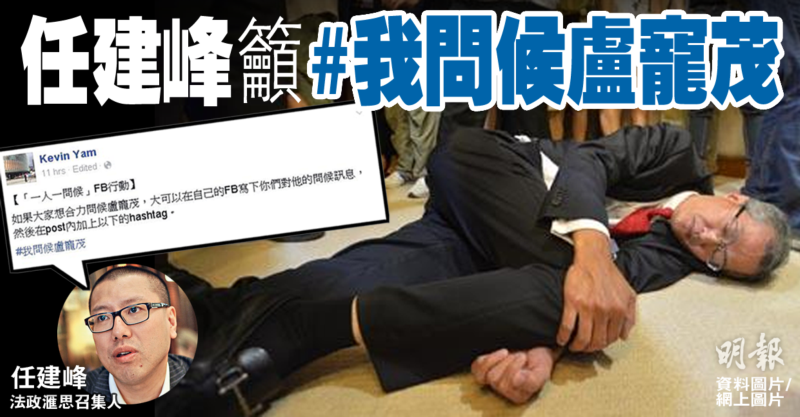
- Ip Kin-yuen demands that Leong Che-hung
give him a full explanation of the decision. Leong said NO WAY and hid
behind the shield of privacy/confidentiality. The voting was by secret
ballots, so Leong is in no position to say who voted which way. The only
thing for sure is that he didn't vote himself. During the pre-vote
discussion, certain members said certain things from which one can infer
revealed preferences. But other council members did not articulate
their preferences so their votes are unclear. The decision was made in a
12-8 secret vote, in which each member cast his/her vote this or that way
for their own personal reasons. This is an aggregated decision. There is no way that
Council chairman Leong Che-hung or anyone else can give a "full explanation"
on behalf of the Council.
- As Henry Tang said after losing to CY
Leung, "I lost because I didn't get enough votes."
- Ip Kin-yuen seems to be the only
pan-democratic legislator standing out in the open to push for Johannes
Chan. Everybody else is in hiding. The reason is that the political parties
have to be concerned about their District Council election prospects,
whereas Ip Kin-yuen is the Legislative Council representing the Education sector.
Ip is not running for District Council and his re-election as Legislative
Councilors is virtually guaranteed by the support of the
Professional Teachers Union.
- The missing Council member is Abraham
Razzak, who is overseas for the moment. He is a pro-establishment legislative
councilor representing the real estate/construction industry. He would most
likely vote against the appointment too. Also chairman Leong Che-hung recused
himself, but he is labeled by Kevin Lau as pro-establishment, so we assume
that he will also vote NAY in the event of a tie. That is, the final score should be 14-8.
- In social activism, it is common to use
misinformation to attain your goals (such as talking about the specter of
the phantom voters during these District Council elections). But this is
usually done to mislead the people who hold the votes. The misinformation
campaign here was conducted by people like Kevin Lau, who wrote a number of
evidence-free "exposÚs". So the people of Hong Kong may have been
successfully misled. But the people of Hong Kong don't hold the votes here.
The votes are in the hands of 22 council members. They read Kevin Lau's
articles about government pressure on them, and they don't find that to be
true in their real lives. So there is this huge blowback now because they
won't submit to this type of dirty trick!
- Example of misinformation:
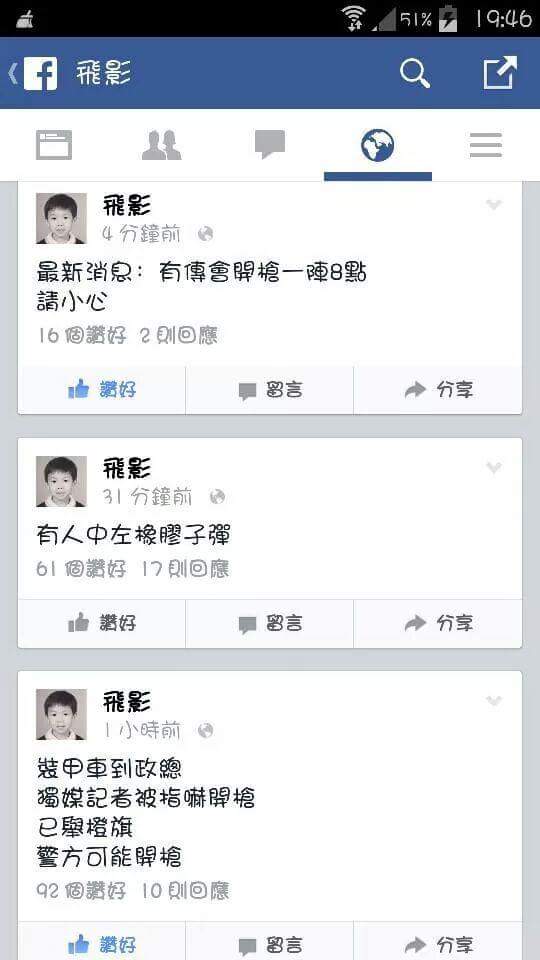
September 28, 2014
One hour ago: Armored vehicle has arrived at Government Headquarters;
independent media reporter threatened with being shot at; the orange flag
has been raised; the police may open fire.
31 minutes ago: Somebody appears to have been shot with rubber bullets.
4 minutes ago: Latest news - they will begin shooting soon at 8pm; please be
careful.
- Is there any chance that Arthur Li could
vote for Johannes Chan? Previously, Kevin Lau wrote in Ming Pao that CY
Leung and Arthur Li sent a middleman to persuade Johannes Chan to withdraw.
This precipitated the student siege of the Council members at the July
meeting. Kevin Lau wrote this breaking story in his opinion column and
therefore he said that he did not need to verify the information. A Ming Pao
reporter contacted Arthur Li before publication, and Li denied that he did
anything like that. However, Ming Pao did not publish Li's response. It was
several days later that Johannes Chan told the media that Arthur Li did not
send any middleman to contact him. Yes, this was several days later when he
knew exactly what the truth was the moment that Lau's column appeared in
Ming Pao. As far as Arthur Li is concerned, Johannes Chan has problems with
integrity, and he does not have the interests of Hong Kong University as his
top priority.
- (The
Stand) Ip Kin-yuen said that he was really pained and disappointed
by the decision. He said that it was clear that this was made for political
reasons, and that is why he is angry and pained. "Hong Kong University will
likely be ruined in the hands of the outside members of the HKU Council." He
pointed out that someone has took over personnel appointments through the
HKU Council. He doesn't know where HKU's autonomy has gone. He said that
Leong Che-hung has sworn that he won't give any accounts and he questioned
whether this was the right attitude. He condemned the Council for talking
only about privacy and confidentiality while tossing accountability and
transparency to the winds.
- Leong Che-hung hinted obliquely that the
decision was made for the "long-term interests of the university." What does
the codeword stand for?
In the short term, the appointment of Johannes Chan to pro vice chancellor
will make Ip Kin-yuen, Billy Fung Jing-en, the Civic Party, etc shut up.
That is good.
In the long term, Johannes Chan will be a negative asset to Hong Kong
University. First of all, every decision that he makes as pro vice
chancellor for academic staffing and resources will be regarded as
political. For example, if he approves the hiring of XXX or the dismissal of
YYY, it will be regarded as political. XXX and YYY may decide to file a
judicial review just like Ip Kin-yuen threatened to file a judicial review
over Johannes Chan's non-appointment. Secondly, Chan's boss is the Provost, for which all four
candidates have backed out already. Nobody wants to have a political time
bomb ticking under his/her wings. The Provost wouldn't dare reprimand Johannes
Chan for any mistakes, because Chan will scream: "Political witch hunt!" If
Johannes Chan is appointed, they may never be able to hire a Provost.
Thirdly, if Johannes Chan is appointed, he will always be in a weak position
because his critics will continue harping away at how he is unqualified but
given the job for political reasons. He will never get
R.E.S.P.E.C.T.
Fourthly, if Johannes Chan is appointed, it will validate the perception
that the way to get a promotion is to "use force to stop tyranny" while
"feeding misinformation to the press."
- The best example of someone who draws fire no matter what he does is Chief
Executive CY Leung. But he pushes on, only because even if he resigns, his
replacement will be in the identical situation. For the pro vice chancellor
for academic staffing and resources, they should be able to find a completely apolitical
person to fill that job.
- According to
Cap 1053 University of Hong Kong Ordinance, the Council shall
consist of:
(a) 7 persons, not being students
or employees of the University, appointed by the Chancellor, one of whom
shall be appointed the Chairman by the Chancellor;
(b) 6 persons, not being students or employees of the University,
appointed by the Council;
(c) 2 persons, not being students or employees of the University, elected
by the Court;
(d) the Vice-Chancellor
(e) the Treasurer
(f) 4 full-time teachers elected in accordance with regulations;
(g) 1 full-time employee of the University, not being a teacher, elected
in accordance with regulations;
(h) 1 full-time undergraduate student elected in accordance with
regulations; and
(i) 1 full-time postgraduate student elected in accordance with
regulations.
Why is there only one undergraduate student
representative on the Council? Because undergraduate students are there for
only four years and have no idea how to run a University (even if they think
they do).
Here is the current
HKU Council membership (see also
SCMP). You can Google their respective qualifications.
Example:
Arthur Li
Kwok-cheung.
- The university belongs to its staff,
teachers and students. All decisions should be made by these stakeholders
and not by any outsiders who know nothing about the university and its
regulations.
- Know nothing? Pick any current council member from outside the university and any
student now enrolled in the university, and quiz them about university regulations. Who do you think
is more likely to know
nothing?
- The mental hospital belongs to its staff and patients. All decisions
should be made by these stakeholders in a democratic fashion. Since there
are far more patients than staff, this means that all decisions in the
mental hospital shall be made by the patients.
- No, schools are not mental hospitals. The situation is different.
- Okay, the elementary school belongs to its staff, teachers and students.
All decisions should be made by these stakeholders in a democratic fashion.
Since there are far more students than staff and teachers, this means that
all decision in the elementary school shall be made by the students who are
aged 12 or under. Okay?
- The reason why there are outsiders on the Council is that they provide
broader perspectives and they have no conflict of interest. For example, Ip
Kin-yuen says that the Hong Kong University Ordinance should be amended so
that the HKSAR Chief Executive is not the chancellor. Fine, but how do you
get there? HKUSU president Billy Fung's method would be to "use force to
stop tyranny." That may crack a few skulls (mostly their own plus some
of the security guards) but it won't change the
ordinance. You can get an opinion from Council member Abraham Razzak, a
legislative councilor who can tell you one or two things about legislating.
- Last time, Hong Kong University Students'
Union president Billy Fung Jing-en said:"We are going to charge and clash at
all of the University Council meetings."
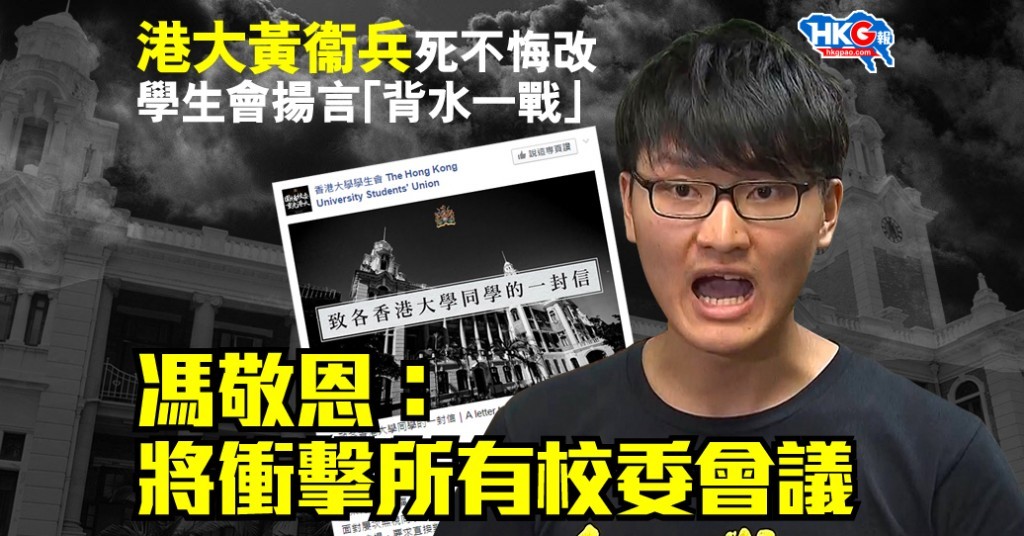
- The
Oriental Daily news story says that Hong Kong University Students'
Union president Billy Fung has just spilled the beans. He is the
undergraduate student member of the HKU Council. So much for privacy and
confidentiality. Here are some of the highlights:
- Arthur Li said that Johannes Chan does
not have a doctorate and is therefore unqualified to be pro vice
chancellor. The reason why Johannes Chan got to become the Dean of the
Faculty of Law was because he was a 'nice guy.'
- Leonie Ki, Margaret Leung Ko and
Benjamin Hung said that the personal integrity of Johannes Chan is dubious
because he jumped the gun to claim that he was the sole candidate
recommended by the selection committee. As senior managers in large
corporations, they would not hand the job over to Chan.
- Lo Chung-mau was bitter that Johannes
Chan did not show sympathy to him when he got injured in the Council
meeting in July. Lo also said that Chan's academic accomplishments are
worse than assistant professors.
- Former Lingnan University president
Edward Chen said that Johannes Chan rarely publishes in academic journals
and he wonders if his academic accomplishments are as good as other pro
vice chancellors.
- Martin Liao said that Google showed that Johannes Chan's academic articles have been searched for only
four times in the last five years.
- Rosanna Wong said if Johannes Chan is
appointed, it would be cause great rifts within Hong Kong University.
Billy Fung said that he was willing to be
criticized for violating the confidentiality rules, and he apologized for
it.
Video: Resistance Live Media
https://www.youtube.com/watch?v=Gk9nHxN1TDI
- (SCMP)
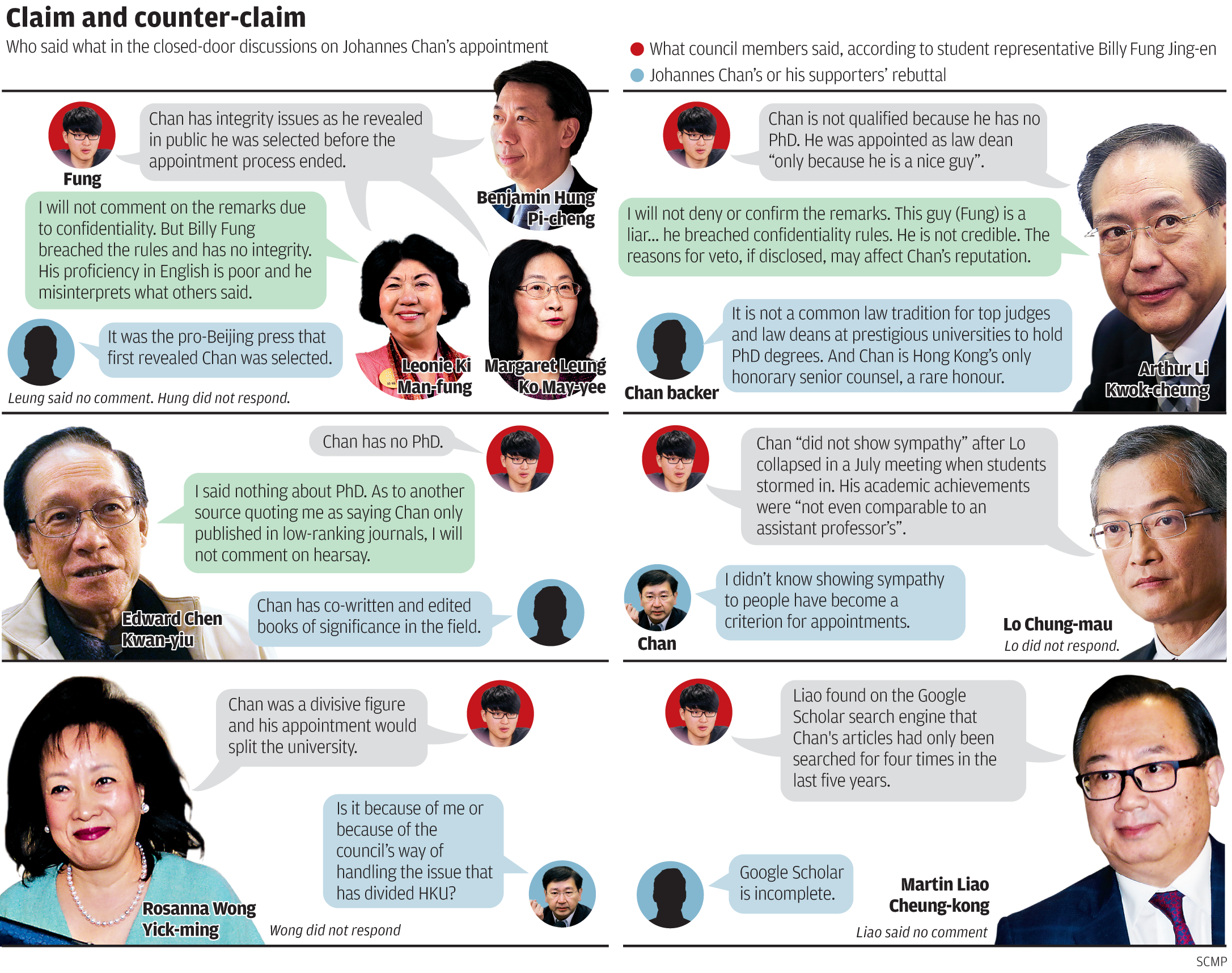
- Former Lingnan University president
Edward Chen was contacted by
Ming Pao for Billy Fung's quotation of him. Chen said that he did
not say that. He seemed to imply that Fung was not paying attention to the
content of the discussion. "He did not even know who said what."
- (Wen
Wei Po) Another source said that what Edward Chen said was that
Johannes Chan seldom published in academic journals. Furthermore, Johannes
Chan was not evaluated after he was promoted to professorship in 1998 so
that there is no up-to-date objective assessment of his academic
qualifications at this time. So there is a discrepancy with Billy Fung's
presentation of what Edward Chen said.
- Billy Fung said that he was merely reading from the notes that he took
during the meeting, and he does not know for sure it was Edward Chen who
said it. Is that fair?
- (Speakout
HK @YouTube)
0:25 Radio host: Edward Chen did not say that (Johannes Chan) did not have a
doctorate. He said that maybe you weren't paying attention while you
listened.
0:30 Fung: I was taking notes. When each person spoke, I jotted down notes.
I was listening to what they were saying. Maybe while I was jotting ... I
did not make an audio recording ... I cannot go back and check whether he
said it. But when I was jotting at the time, this was what I jotted down.
- Martin Liao was quoted by Billy Fung as
saying that he used Google Scholar to check up on Johannes Chan and found
that his articles were "searched" for only four times over the last five
years. Internet users immediately checked and found that Johannes Chan was
"cited" more than four hundred times over the last five years. This proves
that Martin Liao does not know how to use Google Scholar and therefore
Johannes Chan should be appointed vice pro chancellor. Eh, the alternate
scenario is that Billy Fung's English was poor and he knows nothing about
Google Scholar such that he took "cite" to mean "search" and he jotted down
"four" instead of "four hundred." Is that what Edward Chen is hinting at?
- (Wen
Wei Po) On DBC radio, another council member Cheung Kie-chung said
that Lo Chung-mau began by declaring that he has no relationship to Johannes
Chan (including no contact even after the July meeting when Lo was injured)
and therefore he is basing his decision on academic qualifications. This is
what Edward Chen meant when he said that Fung "did not even know who said
what."
- (EJinsight)
"HKU Council member Cheung Kie-chung
said he believes that Fung was left with no choice but to
make a disclosure to the public, given the lack of explanation surrounding
TuesdayÆs vote." Well, that's sweet. If people are harboring doubts about
whether Fung is telling the truth or merely misunderstanding what was
spoken, then maybe the righteous Cheung Kie-chung can hold a press
conference to confirm that everything that Fung said was true or otherwise
make some corrections. But, no, Cheung Kie-chung has a choice and he has
decided to say nothing. This is just typical Yellow Ribbon Zombie behavior
-- he tells others to charge at the police while he stays behind because he
says that there has to be a division of labor.
- Eight council members voted to support Johannes Chan. Where have the other
six gone? They've got the same problem as Cheung Kie-chung.
- The most common reasons used against
Johannes Chan are his lack of a doctorate, his poor academic citation rate
and, most importantly, his mishandling of the secret donation to Benny Tai.
It seems incredible that none of the council members mentioned this. More
likely, one or more of them did, but Billy Fung cannot mention this. It is
possible to come up with a defense of the lack of a doctorate because not
every
pro vice chancellor does; it is possible get cronies to stand up
for his academic publication record; but there is no defense for the
mishandled donation. Therefore, it has to be
deep-sixed.
- Suppose that Billy Fung quoted correctly
what the council members said and suppose that we don't even worry about the
incompleteness of Fung's quotations. What were these people saying? They
talked about Chan's lack of a doctorate, lack of publications in academic
journals, not showing sympathy to the injured council members, etc. These
council members appear to have very different reasons to vote against Chan.
But in what way or manner do these reasons add up to "Beijing's
interference"? In what way do these reasons add up to "the death of
self-determination/autonomy at the university"?
- Billy Fung said that he had nothing
personal to gain but he wanted to protect the students' right to know. Fine.
So why is he only quoting the council members who appear to oppose the
candidate. What about the others? For example, what (if anything) did
Vice-chancellor Peter Mathieson say? Shouldn't we know where he stands? Why
is the selective release of partial information protecting the students'
right to know?
- (Wen
Wei Po) Billy Fung said that one criticism of Johannes Chan was that
he revealed in public that he was selected before the appointment process
ended. However, people tracked down later that Wen Wei Po was the first to
leak that Johannes Chan had been selected. This is confusing the roles of
the press and the principals. On one hand, the press has the freedom to
report on what it thinks is important to the public. On the other hand, the
principals have the obligation to stay silent about the appointment process.
Indeed, the Council kept its side of the bargain and declined to answer all
press questions about the pro vice chancellor appointment. Even after the
final vote was taken, the Council chairman Leong Che-hung refused even to
name the candidate on privacy grounds. But the principal Johannes Chan
decided to speak to the press and talk about his candidacy. LegCo chairman
Jasper Tsang said: "If a newspaper reported that Chan is the sole candidate,
those in the know who support or oppose him should remain silent, or simply
answer that no comments will be made on a matter that is being handled.
Perhaps the pro-Beijing Wen Wei Po does not like Johannes Chan for what he
did during Occupy Central. Maybe Wen Wei Po published many articles to
denigrate him. But so what? As the saying goes: It takes two to tango. If
Johannes Chan and the other Council members refuse to comment, there is no
story."
- These Council members were questioning
Johannes Chan's academic accomplishments. His supporters (including Billy
Fung) seemed to be ill-prepared to mount a defense either because they were
unfamiliar with his work (so how could they make a reasoned decision then?)
or else they were familiar with it and knew that it was indefensible. Their
only recourse is either to "use force to stop tyranny" in the July meeting
or else hold a post-meeting press conference to launch a news bomb with
misattributed information.
- The diatribe from Billy Fung may just
lead investigative reporters to look into the scholarly articles of Johannes
Chan and give them a proper appraisal. Not sure that Johannes Chan would
appreciate this. Nothing good can come out of this for him, because the
fight for the pro vice chancellor job is over and done with already.
- With allies like Billy Fung, who needs enemies?
- This seems to be the message that the discussion forums are getting --
namely, Johannes Chan sucks in academic research. They are wondering if
Billy Fung is helping Johannes Chan, or stabbing him in the back?
- The tragedy is that Billy Fung actually believes that he is doing a favor
to Johannes Chan.
- (Wen
Wei Po) Arthur Li neither confirmed nor disavowed to i-Cable about
what Billy Fung attributed to him. He criticized Fung for signing a letter
of confidentiality and then betraying the promise. "Should you believe this
liar?" Li said that there are many reasons why the contents of the
discussion should be kept confidential, because there are some allegations
that may have negative impact on the character, reputation and standing of
Johannes Chan. In a free discussion, allegations may be raised but also
rebutted with counter-arguments. But if you insist on total transparency, it
means that everything you say will be used against you.
- Billy Fung said that if the council
members are not ashamed of what they did, they should not worry about other
people knowing what they said. Fung does not understand what the system of
confidentiality is there for. Lo Chung-mau said: "As a university scholar,
anonymous academic or job evaluations should be routine. For example,
articles that are published in the academic journals, applications to fund
research projects, nominating individuals for academic prizes and awards,
job promotions/demotions/transfers/hires/dismissals are all based upon this
gold standard. Confidentiality allows one to be objective and honest in
making the evaluations. Without confidentiality, everybody becomes
hypocrites who act as rubber stamps for the sake of friendship and power."
- Yes, there should not be any attorney-client, doctor-patient and
priest-penitent privileges. Every discussion with your attorney/priest and
all your medical information should be posted on Facebook/Instagram/Twitter.
If you don't, it means that you must be ashamed or guilty of something or the other.
- If Johannes Chan is such a lousy
candidate, then why is he the only choice for the selection committee? So he
must have some good.
- Easily explained. Johannes Chan and his cohorts have turned the whole
affair into such a stinking mess that no one else would put themselves
forward for that position. Thus, Johannes Chan was the only applicant. What
else could the selection committee do?
- Billy Fung said that he will accept the
consequences of his news bombs. This sounds exactly like the kind of rubbish
that Alex Chow
was spouting: "You break the law, but as long as you surrender yourself
afterwards, you will have completed the loop for the rule of law." Except
one year later Alex Chow hasn't surrender himself and completed the loop
yet. Billy Fung has no intentions to either. He will continue to sit on the
Council and read out the minutes to the press afterwards. If he gets booted
off, he will cry POLITICAL PERSECUTION!
- Who is going to hire Billy Fung when he graduates? He has shown himself to
be thoroughly untrustworthy. If he goes with you to meet with a client, he
is going to post what everybody said on his Facebook with negative
annotations!
- Not even pan-democratic legislators would hire him as an aide. How can you
let him get close to any secrets? You go and have a lunch with a
government official, and nothing really happens. When you get back to the
office, you find that the lunch date is already known all over Facebook. You
ask him, Why? He'll tell you that if you have nothing to hide, you shouldn't
have to worry that everybody knows.
- Apple Daily can hire him for their paparazzi team. He seems to have no
moral scruples and knows how to rant on about the people's right to know and
the freedom of expression.
- Civic Party legislator Kwok Ka-ki said
that the confidentiality system isn't everything and should not override the
quest for justice. I'm all for it. So why doesn't Kwok Ka-ki ask Occupy
Central trio member Chu Yiu-ming who gave him that secret donation? So far
Chu has been hiding behind the shield of confidentiality! Don't we the
people have the right to know just who was funding Occupy Central?
- Johannes Chan got reprimanded for that affair too, so he presumably knows
the identity of that secret donor. If there is "nothing to be ashamed of"
(in the words of Billy Fung), Chan should tell us who that was.
- While we are at it, we the people also want to know the financial details
for Alliance to Support Democratic Patriotic Movements in China, Occupy
Central, Scholarism, etc. All these organizations solicit donations from
the public by street booths and other means. None have divulged where the
money came from or went to. We the People have the right to know.
- (Oriental
Daily) April 6, 2015. The Federation of Students objected to the
recommendation that those university students who have defaulted on their
student loans have the information forwarded to the credit bureaus. The
amount of default loan is $200 million over the past 3 years. Well, why have
they suddenly embraced confidentiality? If the defaulting students have
nothing to be ashamed of, they shouldn't violate the public's right to know
who the deadbeats are.
- (i-Cable)
October 2, 2015.
Because Billy Fung named the council
members one by one and detailed what they said, he has become a target of
criticisms. Fung said that he had decided to disclose what the council
members say on the day before the meeting. He also assessed the potential
consequences.
Afterwards, Billy Fung was denounced for
being a "liar" and for violating the confidentiality rules. Fung
counterattacked by saying that if he was lying, then he would not be
violating confidentiality. He said that the worst case scenario was that
he would have to withdraw from the school.
Fung said that he was still seeking legal
advice. Once the council makes its decision, he would file for a judicial
review as an individual and he will apply for legal aid to pay the bills.
- If he told the truth, then he broke
the confidentiality rule. If he lied, then he is a liar. Either way, he
has an integrity problem. What kind of student would back himself into
this dilemma? Is this the typical HKU student?
- Usually you play the coin tossing
gain with "Heads I win, tails you lose." Billy Fung plays "Heads you
win, tails I lose." He is a true gentleman.
- If he told the truth, then he may get
kicked off the Council or even the university. If he lied, some council
members may file libel suits. So which is worst for him?
- Half the time he told the truth, and
half the time he told lies. He broke confidentiality and he is a big
fucking liar too. So he gets kicked out of school and then sued for
libel.
- Fung wants to apply for legal aid in
order to file for a judicial review. DLLM! I as a taxpayer will have to
pay the bill! Fucking parasite!
... digging an ever deeper hole for
himself each day.
- (Passion
Times) September 30, 2015.
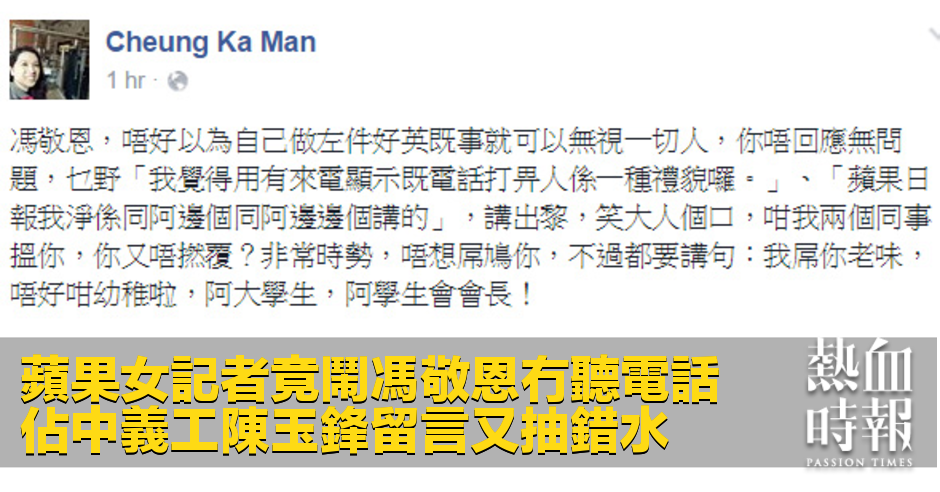
Cheung Ka-man (Apple Daily): Fung Jing-en,
do not think that just because you did something heroic means that you can
look down on everybody. If it is alright if you don't respond. But saying
"I feel that it is a common courtesy to show your telephone number when
you call" and "I only speak to XXX and YYY over at Apple Daily" really
makes people laugh. When those two colleagues of mine call you, you don't
fucking reply either? These are unusual times, so I don't want to fucking
scold you. But I need to say this: "I fuck your mother, please don't be so
naive, University Student, Student Union president!"
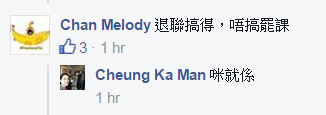
Melody Chan (Occupy Central Secretariat):
He worked on withdrawing from the Federation of Students, but he won't
work on a class strike now.
Cheung Ka Man: So it is.
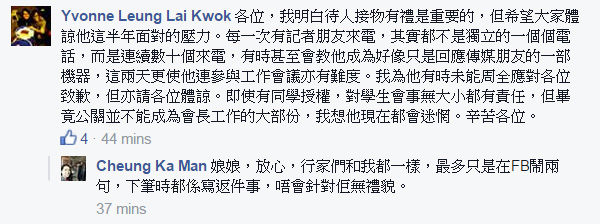
Yvonne Leung Lai Kwok (former HKUSU
president): Everybody, I understand that it is important to have polite
manners with others. But I hope that you can appreciate the pressure he
has been under over the past half year. Each time that a reporter calls,
it is not one independent call. Several dozen more calls will be coming
in. Sometimes he becomes a machine that answers the calls from reporters.
Over the past couple of days, he finds it hard to even attend work
meetings. I apologize on his behalf to everybody for not being thoroughly
considerate. I hope that you can appreciate that. Even though he is
elected by the students, he is responsible for everything in the Student
Union. In the end, public relations should take the majority of the
Student Union president's time. I think that he must be vexed now.
Cheung Ka Man: To the Queen, it's okay.
The peers and I are alike. We will just mumble something on our Facebook.
When we write our articles, we won't target his lack of manners.
- (HKFP)
Hero or traitor? Student leader Billy Fung receives mixed reactions for HKU
Council leak. October 2, 2015.
The University of Hong Kong Student Union
president Billy Fung Jing-en has come under fire from members of the HKU
Council for disclosing confidential information regarding the appointment
of the pro-vice-chancellor.
On Tuesday Fung breached the CouncilÆs
confidentiality rules by publicly revealing the reasoning behind the
CouncilÆs controversial decision to reject Johannes Chan Man-munÆs
candidature for the UniversityÆs pro-vice-chancellor.
Council member and HKU professor Lo
Chung-mau released a strongly-worded statement accusing Fung of using
ôdishonest means to achieve his aimö, RTHK reported.
Earlier, Council chairman Edward Leong
Che-hung had also issued a statement condemning ôthe deplorable actionö by
Fung for showing ôdisregard and disrespect forà the Council memberÆs
pledge of confidentiality.ö He said the Council would consider sanctions
against Fung.
Fung, however, continues to defend his
decision. He told the RTHK that the open and transparent operation of the
Council is more valuable than the confidentiality clause. He also said
that his revelation was not for personal gain but was in-keeping with the
right of the students to know the CouncilÆs reasoning.
Others are applauding FungÆs move as a
heroic one.
In a China File blog post, Oxford
University doctoral student and China commentator Samson Yuen said that if
it was not for FungÆs ôheroicö leak, the public would have been kept from
the CouncilÆs ôanti-intellectualö reasoning behind ChanÆs rejection.
Chairman of HKUÆs Academic Staff
Association Dr. William Cheung Sing-wai told The Stand News he is proud of
Fung for speaking up for righteousness.
- (EJinsight)
October 8, 2015.
A
maverick businessman has offered an employment contract worth HK$480,000
to Billy Fung in a show of support for the HKU Student Union president
after the recent controversy related to the university governing council
meeting.
After Fung revealed to the public what transpired during the Sept. 29 HKU
Council meeting, when pro-establishment members blocked law dean Johannes
ChanÆs appointment as the pro-vice-chancellor, the student leader faced
criticism for breaking the councilÆs confidentiality arrangement.
Some
people from the pro-Beijing camp even said that Fung wouldnÆt be able get
any job in the future as employers would see him as a person who canÆt be
trusted.
Now, to disprove such critics, Kwok
Shiu-ming, who has various business interests and ventures including Man
Fook Jewelry, has announced that he is willing to offer a two-year
contract to Fung with a monthly salary of HK$20,000 anytime within the
next three years.
Kwok said he was furious when he learnt
about the personal attacks on Fung, saying that they were akin to what
happened during the Cultural Revolution in China. ôOur society should not
be like that,ö Kwok said. ôAuthorities are trying to bully an ordinary
citizen. There must be justice in society.ö ôWhen a society catches an
unhealthy trend, we need to reverse that with a healthy trend,ö the
businessman told independent online media outlet SocREC.
Kwok, who is not to be confused with Sa
Sa chairman Kwok Siu-ming who shares a similar Chinese name, has now hit
back at the critics, calling Arthur Li ôrubbishö and challenging Li
Tien-ming for a public debate.
A man of mystery and miracle, Kwok had a
PhD in Buddhism and founded an international exchange of Sakyamuni
cultural centre. Once a boxer and also a car mechanic, Kwok evolved into a
businessman and launched multiple ventures. In 2010, he stood for election
in the Kowloon West geographical constituency but secured just 91 votes,
ending his ambitions of becoming an independent legislator.
On a Buddhism website, he has been
described as a man with a crew cut who drove a Morris Minor in the 50s
playing Indian music and wearing a 20s Rolex watch. Going by his latest
pronouncements, Kwok still hasnÆt lost his rebellious streak.
- HKU Department of Education associate
professor Li Hui: "You (Johannes Chan) have no doctorate and no genuine
academic accomplishments. We can deal with that. But while you were the Dean
of the Faculty of Law, you led the way to encourage Occupy Central, you
mishandled donations, you destroyed the rule of law and you violated
university regulations. We find that hard to accept. We cannot believe that
you are qualified or that you have the nerve to still want to become the
university pro vice chancellor. Even if you get the job, how can you
convince the masses?"
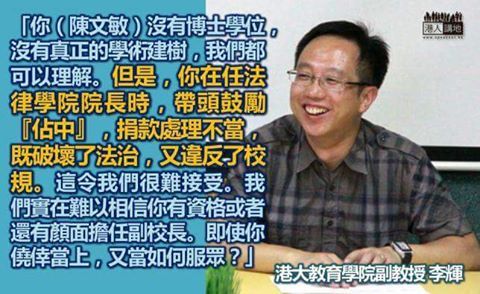
- (The
Stand) The 12 Council members and the Council president Leong Che-hung
were implementing a political assignment from the Chinese Communists and the
689 government. They gave up academic freedom and institutional autonomy.
They damaged the basic interests of Hong Kong University. The students,
staff, teachers and alumni have no choice but to fight till the very end for
themselves, their alma mater and Hong Kong society as a whole. The most
direct action is for the students to stop attending classes and the teachers
to stop teaching. Let us boycott the Council until as such time as the
decision is retracted. Hong Kong University affairs is not just for Hong
Kong University people. It is actually an extension of the Umbrella
Movement. The democratic movement did not end with the clearance of the
Occupy sites. As long as the deep-layer social contradictions are resolved,
they will explode out at various levels. The battle will continue until we
attain the final victory.
If we cannot occupy the streets, let us occupy the University of Hong Kong.
- CY Leung must be saying: "Yes, go
ahead. Stop attending classes and stop teaching, as if I care. Ouch, this
is really hurting me ... NOT!
Go
ahead make my day."
- If the students go on strike by not
attending classes, they may get failing grades and thus postpone their
graduation. But that would be something that they choose to do themselves
as adults. If the teachers go on strike by not holding class, some student
is going to file a civil lawsuit to recover tuition fees and/or lost time.
E.g. "I'm in my sixth year of undergraduate studies and I am only two
courses short of graduation. I've paid my tuition fee of $50,000 for the
year already. I plan to go overseas and study Buddhism next year. But now
the teachers refuse to hold classes!? I am screwed!"
- The student/teacher strike is
consistent with the philosophical approach of Occupy Central. That is to
say, you hold the entire student/teacher population (especially your own
selves) as hostage in order to extract something that your small group
wants from the authorities.
- Another similarity with Occupy Central
is that the tactic dominates over any goals (their definitions and
realistic assessment of the likelihood of success). Do you think a
student/teacher strike will enable Johannes Chan to become the pro vice
chancellor? Or make the Legislative Council amend the law so that the
HKSAR Chief Executive does not automatically become the chancellor of all
eight universities? Or make the University Council be elected completely
from among the staff, teachers and students by genuine universal suffrage
without any outside members? What are the chances of these goals being
realized by student/teacher strikes?
- The biggest similarity with Occupy
Central will be the end result. After months of student/teacher strike,
the silent majority is going to explode in anger, speak out and stop this
type of thing from then on. Except for a few diehards, the participants
will pretend that they have nothing to do with the strikes.
- (HKG
Pao) October 2, 2015. Former HKUSU magazine Undergrad deputy chief
editor Chan Ah Ming wrote on Facebook: "After the battle last year, I no
longer advocate a student class strike. A class strike only hurt
yourselves, not them. It does more harm than good. At the next Council
meeting, let's have another physical clash to counter-attack the Communist
dogs. This is the best option out of very bad options." This drew praises
from many radicals: "Magnify it" "The revolution is the main dish, because
it is better than small actions without material gains" "Bring tomatoes to
throw at the Council members" "Fucking beat up Arthur Li and Lo Chung-mau!"
"If only we had beaten up those old bastard Communist dogs so that they
have to be hospitalized for a few months ..."
- (Reuters)
... the HKU's
president, Peter Mathieson, told Reuters before the vote that he believed
pressure on him and others who back Chan's appointment was being
"orchestrated". He said his personal emails had been hacked and some had
been published in pro-Beijing media. He added that he could not rule out
the possibility Beijing was behind the episode.
- (Hong
Kong Free Press) September 30, 2015. Hong Kong University
president Peter Mathieson believes the pressure on him and others who had
backed the appointment of Johannes Chan as pro-vice-chancellor was
ôorchestratedö by some political elements. Mathieson told Reuters that his
personal emails had been hacked and that some had been published in
pro-Beijing media. He said he cannot rule out the possibility that Beijing
was behind the episode.
- Well, I can rule out the possibility
that Beijing is hiding underneath my bed -- I just checked. I am being
facetious here, but what grown-up can tell the media that? This is the
same as the factually challenged fantasies from the poison pen of Kevin
Lau or the $100 million man Leung Kwok-hung -- if Peter Mathieson has a
shred of evidence (such as a midnight phone call from the bogeyman CY
Leung), please say so.
- Interesting. You cannot rule out the possibility of XXX. Just how can
you rule out that possibility? Maybe Xi Jinping gave you a call and
assured you, but can you trust him? Maybe the CIA/MI6 told you that their
surveillance did not reveal anything, but that only means the Commies are
even smarter? There is in fact no way for you to rule out the possibility
of XXX.
- (RTHK)
As a HKU graduate, Martin Lee feels ashamed and humiliated by the outcome.
With respect to Vice-chancellor Peter Matheison's disclosure that he could
not rule out the possibility of Beijing behind the affair, Martin Lee said
that Johannes Chan would be pro vice-chancellor already but for Beijing's
interference.
If not for Beijing's interference, Martin Lee would be President of the
Hong Kong Republic already.
If not for Beijing's interference, Jimmy Lai would be operating Next TV in
Hong Kong already
If not for Beijing's interference, Hong Kong would have vindicated the
June 4th 1989 movement already.
If not for Beijing's interference, [Please fill in the blanks with your
own wish list; don't worry if you have no evidence because that is not a
requirement]
- (SCMP)
"Meanwhile, HKU vice-chancellor Peter Mathieson
clarified a Reuters report that quoted him as saying he could not rule out
Beijing was behind the rejection of Chan. He said last night the interview
was done on August 4, and he was talking about his email account being
hacked, since he "did not know who" did it." Dr. Mathieson,
welcome to the Hong Kong world of media distortion!
[Note: The above is put in bold red because it did not seem to have been
picked up by other media outlets.]
- Every word that Reuters reported was
accurately transcribed as spoken by Peter Mathieson, except it is being placed in a different context
for reporting purposes!
- I am sure that Reuters will be happy to
issue a non-apology apology: "We are sorry that certain users
misunderstood."
- (SCMP)
The universityÆs vice-chancellor has declined to say whether Beijing was
behind the councilÆs decision. Speaking after the official National Day
reception this morning in Wan Chai, Professor Peter Mathieson stated, ôThe
council made the decision based on a thorough debate of all the issues.ö
When asked whether he believed Beijing interfered with the council
membersÆ deliberations, Mathieson said only that council members could
speak for themselves. ôEverybody has their own reason,ö he said. ôThe
principle should be that decisions are made in the best interest of the
university, and thatÆs certainly the principle I bring to all my
decisions.ö
(Hong
Kong Free Press) October 1, 2015. In an interview with Reuters
published on Tuesday, Mathieson reportedly said back in August that he
believed pressure on him and others who back ChanÆs appointment was
orchestrated. He also said that the contents of his email had been
published by state media and it was possible ôBeijing was behind the
episode.ö However, Mathieson told Ming Pao on Wednesday that the interview
took place before the Tuesday HKU Council meeting. He said the contents
were taken out of context. He also said he was not sure who was behind it
and that he could not exclude any possibilities,
but he was not deliberately criticising or pointing the finger at anyone.
- (SCMP)
In a statement, Johannes Chan said he had no further comment, now that the
decision was made. "This is not an issue of personal gain or loss, but one
about the core values of academic freedom and institutional autonomy," Chan
said. He called on HKU supporters to keep safeguarding those values and not
to feel frustrated.
- Thus begins the Johannes Chan watch to see how many days elapse before he
files a judicial review. He
will
not be ignored. Addendum: He was only able to hold off for less than 12 hours
as
he turned up on two radio programs the next morning. Tsk tsk tsk.
- On July 27 2015, Johannes Chan told the
Hong Kong Economic Journal in an interview that he was informed by the HKU
Selection Committee in December 2014 that they will recommend him for the
job of pro vice chancellor. The start date was set at March 17 2015, and all
the terms and conditions in the contract have been agreed upon. According to
the
Cap 1053 Hong Kong University Ordinance Section 12 Officers and
teachers, their appointment, powers, duties and emoluments Article (6) The
Vice-Chancellor, the Deputy Vice-Chancellor, the Pro-Vice-Chancellors, the
Treasurer, the Registrar, the Librarian, and the other officers designated
as such by the statutes shall be appointed by the Council in accordance with
the statutes." That is to say, the power to appoint the pro-vice-chancellor
lies solely with the Council and nobody else. So who on the selection
committee is telling Johannes Chan that he has got the job ready to start on
March 17 2015 with all the terms and conditions being finalized already?
Just on March 4, 2015 Vice-Chancellor Peter Mathieson said that the
selection committee has not forwarded its recommendations to the Council. If
Johannes Chan has some familiarity with
Cap 1053 Hong Kong University Ordinance, he must surely know that
the person is acting way beyond his authority. If Honorary Senior Counsel
Johannes Chan is not familiar with that piece of legislation, then maybe he
should not think about become pro vice-chancellor at that university.
- (Bastille
Post) The Third Kind of Opinion. September 30, 2015.
At a dinner with friends, the Yellow
Ribbons and Blue Ribbons began to argue with each other just like they did
during Occupy Central (...). At this time, one person who seldom touched
political subjects suddenly interjected: "If this keeps on, what will
happen to Hong Kong University in the future?"
This friend is a HKU alumnus. He
graduated more than 30 years ago. His daughter is in Form 5 of an elite
school and considering whether she should apply to HKU to do a double
major in Business Administration and Law. She is rated as capable of
getting 34 marks in the DGSE and therefore can qualify for that program.
But her father said that HKU is increasingly politicized and surpassed by
UST in the most recent QS ranking. The daughter is vexed, because she does
not like the politicized environment of HKU. She asked her dad whether she
should be going instead to study law in England instead.
My friend said that law schools in
England are just as good, but there is a separate problem. In recent
years, the legal sector in Hong Kong has protected itself by requiring
graduates from law schools in England to take a PCLL course before they
are allowed to intern. Previously, those who graduated from law schools in
England are automatically allowed to intern. Since PCLL places are
limited, this may be a risk.
My friend said that he is a HKU alumnus
and his daughter is a potential applicant. As such, they qualify as
so-called "stakeholders". But does anyone care about what they think? He
said that everybody likes to do politics nowadays, so that HKU has been a
political institution with quarrels breaking out daily. Everybody
including the University Council, the University president, the staff, the
teachers and the students don't seem to care about the university rankings
or recruiting the best and brightest. My friend said that if his daughter
chooses to go to England, she better go there to do AS level at Form 6 in
order to get into a good school. In England, the annual expenses are more
than $400,000 per year. This is far more than the $50,000 to study at HKU.
So it will cost him more than $2 million over five years. He said that
universities in Hong Kong are subsidized by the taxpayers. But why do they
wind up like this? If these people want to play politics, they ought to go
to the Legislative Council.
As my friend went on, he got angrier and
angrier. The Yellow Ribbons and the Blue Ribbons at the table dared not
speak, because nobody knew how to answer him. Before he left, he reminded
me to write down what he said and publish it, because there are many
people like himself in the silent majority. They are all sick and tired of
the endless politicking. They want to lead normal lives without politics
driving everything. Unfortunately for them, things are otherwise as they
find by reading any newspaper. Their "third kind of opinion" is completely
ignored. He only wants to the university to stop politicking and do their
academic work well.
- (SCMP)
Doctorate not that important for HKU managerial post, says committee member
in Johannes Chan case. October 1, 2015.
A member of the search committee that
recommended Johannes Chan Man-mun for a pro-vice-chancellor's post at the
University of Hong Kong has said professional experience and standing is
more important than a doctorate degree.
As the committee's recommendation was
rejected by HKU's governing council on Tuesday night, the member, speaking
on condition of anonymity, said the council's considerations "differed"
from the selection body. During the meeting, pro- government members who
opposed Chan's appointment were said to have cited reasons including Chan
having no PhD degree and not publishing enough in international journals.
"This is a managerial post. We put more weighting on the managerial skills
than academic qualifications," the member said. "For professional
faculties such as law, medicine and dentistry, professional experience and
standing count more than publications in journals."
International and local legal scholars
came to Chan's defence. Yash Ghai, an internationally renowned public law
scholar and an emeritus professor at HKU, said it was "absurd" to say Chan
was not qualified for the job because he had no PhD, as some of the
world's leading law professors and scholars did not have doctorate
degrees. To say Chan seldom published in journals was a "deliberate
attempt to vilify him", Ghai said, noting he had published in well known
journals locally and overseas.
Chan has a 30-page list of publications
on his HKU webpage that includes books, articles, conference papers and
research projects. One of the recent works, Law of the Hong Kong
Constitution, which he co-edited and co-authored, was hailed by former
chief justice Andrew Li Kwok-nang as "a seminal work" on the Basic Law.
Cheryl Saunders, a laureate professor at
the University of Melbourne, added that many senior public law scholars
had published major books instead of undertaking PhD studies. Cambridge
University professor David Feldman, who does not have a PhD, said it was a
mistake to regard the international ranking of journals as reliable
indications of the quality of the work published in them. Michael Ramsden,
associate law dean at Chinese University, pointed to the fact that Chan
was the only legal academic in town who was made an honorary senior
counsel, having argued in landmark cases on constitutional law and human
rights. He said it "speaks volumes" about Chan's contribution to the
field.
- (Wen
Wei Po) October 1, 2015.
According to Section 31A
CAP 159 Legal Practioners Ordinance,
(4) The Chief Justice may, after
consultation with the chairman of the Bar Council and the president of the
Law Society, appoint a barrister as honorary Senior Counsel if he
(a) is a member of the academic staff of a faculty or school of law of a
university in Hong Kong; or
(b) holds office as Director of Legal Aid or as a Deputy Director or
Assistance Director of Legal Aid; or
(c) holds office as Official Receiver or an office specified in Part I of
Schedule 2 to the Bankruptcy Ordinance (Cap 6); or
(d) holds office as Director of Intellectual Property or an office
specified in Part I of Schedule 1 to the Director of Intellectual Property
(Establishment) Ordinance (Cap 412), and who has in, in the Chief
Justice's opinion, provided distinguished service to the law of Hong Kong.
(5) The appointment of a person as a
Senior Counsel in an honorary capacity does not confer on the person a
right to act as an advocate in proceedings before the courts of Hong Kong
and will not accord precedence before the courts.
Chan's supporters said that the fact that
he is a honorary senior counsel showed that he is "qualified" to be pro vice
chancellor at the University of Hong Kong. According to senior barrister
Devon Sio Chan-in, a honorary senior counsel is a honorific title compared
to a senior counsel who had to have been a senior barrister with more than
10 years of experience, in a way that a honorary doctorate is to a doctor of
philosophy degree. Sio explained: "Your curriculum vitae is your curriculum
vitae, but a honorary senior counsel is a honorific title. Being a honorary
senior counsel does not stand for your curriculum vitae." When HKU graduate
Rita Fan was asked whether a honorary senior counsel is qualified to be pro
vice chancellor, she had to say that she did not know what the term means.
Is this an academic degree? Or does this mean that the person is a legal
practitioner who specializes in court cases?
Another law practitioner said that the
"honorary" before a title makes it a honorific title: "A honorary senior
counsel is not a proper senior counsel." A honorific title does not imply
academic accomplishment. The universities in Hong Kong have awarded a number
of honorary doctorates, in order to praise the accomplishments of those
people in their respective domains. "But that does not mean that these
people are qualified to teach in universities."
- Jackie Chen is a honorary professor at
the
Hong Kong Polytechnic University and a honorary Doctor of Science
from the Hong Kong Baptist University:
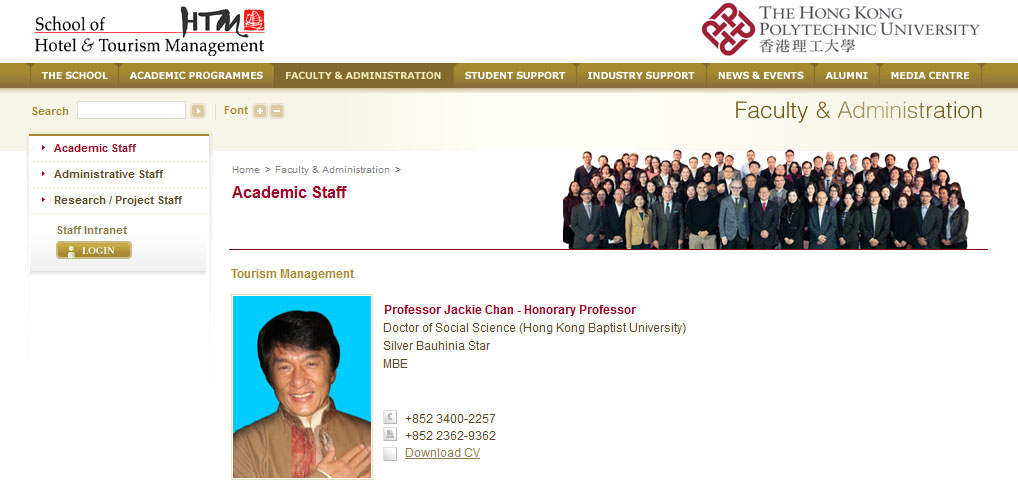
- (Hutchison-Whampoa)
Mr Li Ka-shing, GBM, KBE, Commandeur de la LÚgion dÆHonneur, Grand Officer
of the Order Vasco Nunez de Balboa and Commandeur de lÆOrdre de LÚopold,
has received Honorary Doctorates from Peking University, the University of
Hong Kong, The Hong Kong University of Science and Technology, The Chinese
University of Hong Kong, City University of Hong Kong, The Open University
of Hong Kong, University of Calgary in Canada and Cambridge University in
the United Kingdom.
- (City
University) Honorary Doctors of Law
John J Swaine (November 1993)
Woo Po-shing (May 1995)
Lu Ping (November 1998)
Henry Tang Ying-yen (November 2003)
Norman Leung Nai-pang (November 2004)
Xiao Yang (November 2004)
Patrick Chan Siu-oi (November 2008)
Simon Ip Sik-on (November 2009)
Andrew Li Kwok-nang (November 2010)
Tsang Yok-sing, Jasper (November 2011)
Hatoyama Yukio (November 2013)
-
Top 10 Chinese celebrities with doctor degree
#1. Maggie Cheung (actress), honorary degree
from the University of Edinburgh
#2. Zhang Yimou (director), honorary degree for Doctor of Fine Arts from
Yale University
#3. Andy Lau (singer/actor), honorary doctorate from the University of New
Brunswick, Canada although he was only a secondary school graduate.
#4. Jackie Chan (actor), honorary Doctor of Science from the Hong Kong
Baptist University and honorary fellow of the Hong Kong Academy of
Performing Arts
#5. Lisa Wong (actress), honorary Doctor of Letters from the City
University of Hong Kong
#6. Wong Kar-wai (director), honorary doctorate from the Open University
of Hong Kong
#7. Chow Yun-fat (actor), honorary doctorate from the City University of
Hong Kong
#8. Ang Lee (director), honorary doctorate from the Taiwan Art University
#9. John Woo (director), honorary doctorate from Hong Kong Baptist
University
#10. Eric Tsang (actor), honorary doctorate from University of Dayton in
Keladuoha.
- Johannes Chan is the only individual in
Hong Kong who was given the honorary senior counsel title. Isn't that
proof enough of his exceptionalism?
- Ahem, every other senior counsel earned it the hard way by working for
decades. Johannes Chan got the honorary version through some cronies in
the Bar Association/Law Society without having to work for it.
- (Bastille
Post) A lot of universities hire pro vice chancellors with no
doctorates mainly because these people are hired for their ability to raise
funds from the business community. Very often, these people are hired with
contracts that stipulate the expected amount of donations. If they failed to
reach quota, their contracts will not renewed. Johannes Chan would clearly
not be expected to fulfill this kind of function.
In addition, the university rankings often include the percentage of
doctorates among its teaching staff as one criterion. Therefore they need to
have a good reason before they will hire a pro vice chancellor without a
doctorate.
- (EJinsight)
October 2, 2015.
Is a
doctoral degree necessary for the post of university pro vice chancellor?
The
question arose after the governing council of the University of Hong Kong
voted on Tuesday night to reject the search committeeÆs recommendation to
appoint former law dean Johannes Chan Man-mun pro vice chancellor for
academic staffing and resources.
Billy Fung Jing-en, president of the HKU StudentsÆ Union and a council
member, told media that during the deliberations, council member Arthur Li
Kwok-cheung said that Chan had no doctoral degree and therefore was not
qualified to be a pro vice chancellor.
Fung quoted Li as saying that
Chan could have been appointed dean of law just because he was a nice guy.
Going by LiÆs stated reason for
turning down Chan suggests that his being the only
ôhonorary senior barristerö in Hong Kong is still not enough to qualify
him for the post.
Chinese University professor Simon Shen
Xu-hui, who specializes in international relations, indicated in a
Facebook post that it is ridiculous to use a doctoral degree as a
requirement for the post.
Shen cited the case of ChiÆen Mu,
who was considered
one of the greatest historians and philosophers of China in the 20th
century.
In
1949, he co-founded New Asia College, which later became the Chinese
University of Hong Kong, and became one of its first principals. ChÆienÆs
highest educational level was only junior high school.
In
fact, from 2013 to this year, only four out of six current or former
deputy vice chancellors and pro vice chancellors are doctoral degree
holders, according to research by Ming Pao Daily.
In
2003, Chan said in a media interview that he did study for a doctoral
degree in the London School of Economics and Political Science in 1988,
but he later decided to give it up because he wanted to spend more time
helping people understand legal problems in Hong Kong society that was
then facing multiple issues regarding its return to Chinese rule.
Chan, who has published a number of books and theses and represented many
famous legal cases besides teaching, said he has never regretted his
decision.
On
Thursday, Chan told Commercial Radio Hong Kong that a doctoral degree is
not that important for someone in the legal profession, citing some judges
in the Court of Final Appeal as examples.
- The supporters of Johannes Chan cite the
case of Martha Minow, who is Morgan and Helen Chu Dean and Professor of Law
at the Harvard Law School. Here is what is said about the education
background of
Martha Minow:
After completing her undergraduate
studies at the University of Michigan, Minow received a masterÆs degree in
education from Harvard and her law degree from Yale. She clerked for Judge
David Bazelon of the United States Court of Appeals for the D.C. Circuit
and then for Justice Thurgood Marshall of the Supreme Court of the United
States. She joined the Harvard Law faculty as an assistant professor in
1981, was promoted to professor in 1986, was named the William Henry
Bloomberg Professor of Law in 2003, became the Jeremiah Smith Jr.,
Professor of Law in 2005, and became the inaugural Morgan and Helen Chu
Dean and Professor in 2013.
Martha Minow does not have a doctorate.
Therefore doctorates cannot be all that important. Right?
But you should take a look at this phrase:
"She clerked for Justice
Thurgood Marshall
of the Supreme Court of the United States." That changes everything.
(Reference:
The influence of the Supreme Court clerk at the SCOTUSblog). It
means that many people know that Martha Minow was a central figure in many
of the major decisions of the Supreme Court. So who did Johannes Chan clerk
for? Nobody. In summary, you don't have to have a doctorate to become pro
vice chancellor. But you need to have other accomplishments that are
equivalent to or surpassing a doctorate. If you want to make the case for
Johannes Chan, you cannot just say "Many other Law School deans don't have
doctorates". That is just negating a negative; you need to accentuate the
positives.
- From the Hong Kong University Department
of Surgery staff list: Professor
Lo Chung-mau, Chair Professor and Head of Department, MBBS(HK), MS,
FRCS(Edin), FRACS, FACS, FHKAM(Surg), FCSHK. Well, this bloke doesn't have a
doctorate (either doctor of philosophy (PhD) or doctor of Science (ScD)).
All he has is a bachelor and a master, plus a bunch of fellow titles handed
over by cronies. So how did he get to become a Chair Professor and Head of
Department? By having cronies in high places, of course.
- Oh, on his way to cronyism, his papers have more than 20,000 citations and
he carried out the world's first double liver transplant recently.
- (SCMP)
Hong Kong liver transplant expert Lo Chung-mau is a hero wrongly condemned
as a villain. By Alex Lo. March 21, 2016.
We Hongkongers love
to beat ourselves up. But every now and then, itÆs worth pondering things
that we do right û like having one of the worldÆs great liver transplant
team of doctors at Queen Mary Hospital. But for the efforts of Professor
Lo Chung-mau and his team, a 39-year-old Canadian liver patient and father
of three would have certainly died.
Mike Watson suffered
from a serious liver condition that could kill in three months. However,
his doctors in Canada told him he would have to wait six months for a
transplant. The waiting list was a virtual death sentence.
But his enterprising
wife, Lisa, started researching treatments around the world and found out
about Hong KongÆs pioneering transplant expertise. ôThere are a lot of
people willing to become a donor, but the doctors in Canada told us Mike
was too sick to undergo such surgery,ö Lisa said. ôThey wouldnÆt even give
us a survival rate.ö
LoÆs team was able
to transplant a substantial portion of LisaÆs liver to her husband. Both
have an excellent chance at recovery.
Lo is a pioneer in
performing transplants from live donors. His expertise is recognised
around the world.
People like Lo
are our cityÆs treasures, but he is not being celebrated as such these
days. Instead, trolls on the internet have attacked him mercilessly, while
student activists have hounded him on campus.
This is because he
was one of the members of the University of Hong KongÆs council that voted
against hiring Johannes Chan Man-mun as the schoolÆs pro-vice-chancellor
for research and personnel last year.
Being a council
member for a man of his scientific stature is clearly a thankless task.
Professor Yuen Kwok-yung, HKUÆs renowned virus hunter, saw the Red Guards
were coming and wisely quit before the whole thing went out of hand.
Lo pressed on out of
a sense of duty and was rewarded with public denunciation and character
assassination. But you could hardly accuse him of being a Beijing stooge,
when he was one of the least political persons on the council.
These days, there is
no point for capable and meritorious people to take up public office
because those little Red Guards will go after them unless they toe the
ôcorrectö political line.
- (Oriental
Daily, October 4, 2015) In order to retaliate against Lo Chung-mau
for whatever it was that he did, Internet users have ferreted out the
detailed information on his daughter, including her name, her university and
her department, her telephone number, even her ex-boyfriend. She has
immediately deleted her Facebook account.
- Too late for the ex-boyfriend ... He has only himself to blame for having
made a poor choice.
- They say that outsiders outnumber
insiders on the 22-person university council and therefore the university
has lost its autonomy. But all that happened in 2003.
(HKU)
A three-person review panel, comprising Professor John Niland (former
Vice-Chancellor and President of the University of New South Wales),
Professor Neil L. Rudenstine (former President of Harvard University) and
The Hon. Justice Andrew Li (the Chief Justice of Hong Kong who had been
the Chairman of the University and Polytechnic Grants Committee (now UGC)
for many years) was established by the University to review its governance
and management structure.
The panel submitted its report (the
Fit for Purpose report) to the Council in February 2003, with 17
recommendations on means of enhancing the University governance and
management structure and procedures.
All recommendations in the Fit for
Purpose report were accepted by the Council of the University for
implementation in 2003. These recommendations include the reduction of
the size of the University's governance bodies, the reorganization of the
management team, the establishment of full-time appointed Faculty Dean
positions, the introduction of the trusteeship concept in membership of
the Council, student and staff memberships on Council, changes to the
staff grievances procedures, clearer definitions of the role of the
governance bodies, improvement of communications, and streamlining the
University committee structure.
Specifically, the University Council was
reduced from the previous 54 persons to between 18 and 24 persons, and the
ratio of outsider-insider went from 3:2 to 2:1 so that more outsiders can
provide independent and objective views to improve governance. CY Leung or
the Commies have nothing to do with this. If you want a meaningful
discussion of this issue, please go read the 2003 Fit for Purpose
report first. The panel was formed because the University of Hong Kong
was seriously lagging behind international norms in governance and
management structure. The reasoning is that insiders tend to be myopic and
conservative (that is, they accept the existing structure as natural, they
do not see the need or
possibility for change and they will react reflexively to protect their own
existing
interests). If you want to move to reduce the proportion of
outsiders, you better think hard first about the governance/managements
problems that had existed before 2003.
-
Times Higher Education World University Rankings 2015-2016
#26 National University of Singapore (#25
in 2015)
#42 Peking University (#48 in 2015)
#43 University of Tokyo (#23 in 2015)
#44 University of Hong Kong (#43 in 2015)
#47 Tsinghua University (#49 in 2015)
#55 Nanyang Technological University
#59 Hong Kong University of Science and Technology
#85 Seoul National University
#88 Kyoto University
#116 Pohang University of Science and Technology
#138 Chinese University of Hong Kong
#167 National Taiwan University
#201-250 City University of Hong Kong
#201-250 Fudan University
#201-250 Hong Kong Polytechnic University
#201-250 University of Science and Technology of China
#201-250 Tohoku University
#201-250 Tokyo Institute of Technology
#251-300 Korea University
#251-300 Nanjing University
#251-300 National Tsing Hua University
#251-300 Osaka University
The trend for the rank of the University of Hong Kong
(Wikipedia
for historical data):
#21: 2010-2011
#34: 2011-2012
#35: 2012-2013
#43: 2013-2014
#43: 2014-2015
#44: 2015-2016
Yes, we need the students to quit going to
class and the teachers to quit teaching so as to raise the rankings.
- What university in the world would let its students charge into a Council
meeting and falsely imprison those members who appear to hold dissident
views? If there was a Democracy Index for World Universities, the University
of Hong Kong would shoot through the top of the charts.
(Harbour
Times) December 21, 2015.
According
to the Times Higher EducationÆs online World Universities Ranking Tables,
the past six years have seen a precipitous decline Hong Kong Universities
statistics compared to 2011 when HKU was amongst the 21 best universities
in the world. In the recently published 2016 rankings, the university
dropped 23 places on the list to 44.
That
wasnÆt the worst. Hong Kong University hit the 34th place in 2012, the
35th place in 2013, 43rd in 2014 leading to the all times low, 51st
position in 2015. For all six years the number of students enrolled in the
university remained 19,835, the percentage of international students 38%
and the student:staff ratio 17.60% remain unchanged.
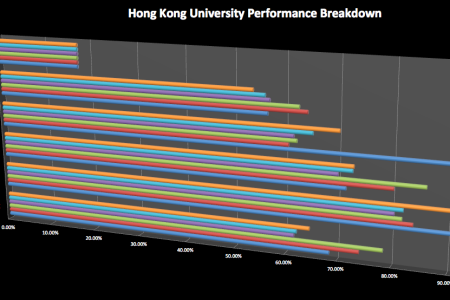
From these rankings, analysis of the
statistics shows the impact of the 2014 developments on Hong Kong
University.
From 2013 to 2014 the University of Hong
Kong noted a 21.43% drop in teaching, 1.71% drop in the international
outlook category and a 18,63% drop in the research sector. The lists did
note a positive change in 2015 in comparison of the 2014 academic year
with 5.85% increase of citations, 3.86% increase of research, 1.99%
increase of the international outlook, 0.81% for teaching but the industry
income further dropped 1,58% more leading to 56%.
From 2014 to 2016 the teaching ranking
(based on the reputational survey (15%), the staff-to-student ratio
(2.25%), the doctorate-to-bachelors ratio (2.25%), the doctorates
awarded-to-academic-staff ratio (6%) and the institutional income (2.25%;
defined below)) dropped 3,91%.
By contrast, through the passage of two
academic years the international outlook of staff, students and research
(measured by the international-to-domestic-student ratio, the
international-to-domestic-staff ratio, and international collaboration)
improved 23,29% . The volume, income and reputation of the research
conducted by the Hong Kong University (defined by a reputational survey
(18%), the research income (6%) and the research productivity (6%)) saw a
growth with a raise of 3.02%.
Citations also improved, rising by 13,82%
but the greatest growth was noticed in the international outlook sector
which grew by 23,29%. The industry income or knowledge transfer, is
determined by how much research income an institution earns from industry
and the institutionÆs ability to attract funding in the commercial markets
of Hong Kong, contrarily dropped by 6.84%, in comparison with 2014
resulting to a negative -5,34% in 2016. However, the rises were not enough
to get the university on its original place and that is why for the 2016
results (published in 2015), the university dropped again to 44th place,
23 spots down since 2011.
The rankings, for all the criticism
leveled at them, have some weight. Many students in the competitive global
market base their choice of which school to attend based on these
rankings. Usually the higher you score, the brighter the minds you attract
to your campus, increasing your standing in rankings in a virtuous circle.
Students look at the rankings, but also
how they are designed, what the trajectory of particular schools is and
how that will impact on their personal future. Mr L³ adds, ôI am aware of
the recent scandals regarding the appointment of vice-principal in HKU. I
believe that the international reputation of the University has been
damaged due to the fact that the radical confrontations between the
student representatives and the university council staffs have been widely
reported by the media. The appointment of vice-principal should be an
internal issue of the university and should not require media attention.
However, the fact that members of the university cannot properly handle
the incident portrays a negative image to the general public.
Additionally, media reports unveil that the universityÆs operations are in
fact closely tied with politics. This seriously undermines the academic
freedom of the university and confidence of the general public in the
quality of education provided by HKU. In the future, I believe this may
reduce the number of exchange students choosing HKU, as well as the
ability of HKU to attract talent to the university.ö
Tang Kai Tsung Louis, a first year
Marketing and Finance student at Lancaster University says, ôPolitical
factors is one of the criteria of university rating, which means political
issues led to the decline in the world university ranking of HKU.ö
Hammond Mo, a second year law student at
the University of Central Lancashire originally from Hong Kong says,
ôuniversity ratings can be affected by all different kind of factors and
sometimes [the lists] are unreliable. I think the reason of rating drops
is last yearÆs revolution. The students were out protesting, having as a
result [the suspension of their learning.]ö
Universities as well do take under
consideration the lists and the the impressions they create to both
domestic and international students they serve and that is why the
university of Hong Kong is trying its best to gain the studentsÆ trust,
proving that even after the protests, incidents with the appointment of
professors democracy will find a way to be achieved in Hong Kong as the
statistic analysis of 2016 suggests.
Almost every sector on the list saw major
improvements comparing to the aftermath of the 2014 suggesting that
although there is a long way until the university is back amongst the
academic institutions stars where it was in 2011, a lot of effort is put
down since then and this is the highway to excellence.
While students take note of rankings, it
appears that they approach them with a grain of salt and do look into the
nuances of individual categories and how they may be influenced by recent
events. They weigh those factors up against their own criteria to make
their decisions of which institute suits them.
So for those who criticise rankings for
leading to simplistic decision making, it would seem to be that the
decision makers arenÆt so simplistic when choosing their career developers
after all. Hong Kong University may still have a reputational fighting
chance if students like what they see in the details of university
rankings.
- (US
News & World Report)
2016 rankings
University of Tokyo, #1 in Asia, #31 globally
Peking University, #2 in Asia, #41 globally
National University of Singapore, #3 in Asia, #49 globally
Tsinghua University, #4 in Asia, #59 globally
University of Hong Kong, #5 in Asia, #64 globally
Chinese University of Hong Kong, #11 in Asia, #119 globally
Hong Kong University of Science and Technology, #16 in Asia, #142 globally
City University of Hong Kong, #23 in Asia, #187 globally
Hong Kong Polytechnic University, #28 in Asia, #217 globally
(Oriental
Daily) University of Hong Kong plunged from #42 to #64 globally, and
from #3 to #5 in Asia.
- (Speakout
HK @youTUbe)
0:05 Host: What specifically did people
from the Hong Kong Institute of Education do in the Hong Kong University
incident?
0:10 Hong Kong Institute of Education Student Union president Leung Ho-ching:
When they charged into the meeting chamber earlier at Hong Kong University,
the Institute of Education people were present. We were there in person to
support and assist.
0:35 Host: Did you spontaneously charge inside on your own, as Billy Fung
said? Did you organize?
0:38 Leung: No, I mean to say that Institute of Education people were there.
0:41 Host: But you charge inside spontaneously and separately on your own?
0:44 Leung: Spontaneously charged inside. Yes.
0:47 Host: The Hong Kong University Students' Union keep saying that people
from the outside should not be interfering with what is happening inside the
school. You come from the Institute of Education. You are obviously someone
from outside the school.
0:52 Leung: Yes.
0:53 Host: So why are you interfering with them? They don't welcome your
interference.
0:55 Leung: Eh, you have to ask the Hong Kong University Students' Union
whether they welcome the people of the Institute of Education coming in.
...
- (Times
Higher Education) 2014/2015 ranking in Social Sciences
National University of Singapore, #29 in
world
University of Hong Kong, #39 in world
Peking University, #42 in world
Hong Kong University of Science and Technology, #38 in world
Peking University, #42 in world
Chinese University of Hong Kong, #66 in world
National Taiwan University of Science and Technology, #81 in world
University of Tokyo, #87 in world
Nanyang Technological University, #92 in world
Tsinghua University, #98 in world
(Times
Higher Education) 2015/2016 ranking in Social Sciences
National University of Singapore, #28 in
world
University of Hong Kong, #39 in world
Peking University, #52 in world
Hong Kong University of Science and Technology, #72 in world
University of Tokyo, #83 in world
Tsinghua University, #93 in world
Nanyang Technological University, #95 in world
- (Oriental
Daily) December 22, 2015.
For the 2012/2013 academic year, Hong Kong
University ran a surplus of $12.3 billion. For the 2013/2014 academic year,
the surplus was $2.5 billion. For the 2014/2015 academic year, the surplus
dropped more than 50% to $1.23 billion.
For the 2014/2015 academic year, the
contribution from the University Grants Committee, tuition income, research
revenues, rent incomes, etc all increased slightly. But donations and
investment earnings dropped 55% and 44% respectively. Specifically,
donations and benefactions went from $1,626,785,000 to $681,949,000.
Reference:
The
University of Hong Kong Annual Report
- (Oriental
Daily) February 24, 2016.
In 2013/14, private donations to the
universities amounted to $2.53 billion. In 2014/15, private donations to the
universities fell to $1.83 billion. Among the 8 universities, donations to
Baptist University fell by 2%, Institute of Education by 33% and Hnog Kong
University by 55%.
(Oriental
Daily) September 28, 2015.
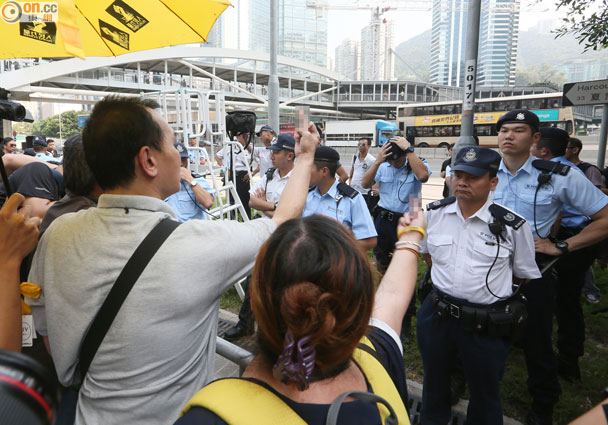
September 28th is the first anniversary of
Occupy Central. People Power's Tam Tak-chi said that he will assemble 1,000
persons to charge onto Gloucester Road and Harcourt Road at 5:58pm to occupy
two car lanes for 87 minutes. The purpose is to commemorate the 87 tear gas
canisters at that moment one year ago at that spot. This afternoon, the
police used a megaphone to tell Tam Tak-chi not to incite the crowd, and to
tell the crowd not to participate. Soon after 5pm, several dozen persons
were assembled near the Admiralty overpass near Connaught Road. They held
yellow umbrellas with People Power insignia and they approached the CITIC
overpass. In response to the police calls, the crowd booed and gave the
finger to the police.
(Oriental
Daily) September 28, 2015.
At 5:58pm , the People
Power members yelled for the police to open the road. The police warned them
not to charge the police line, but some of the demonstrators broke through. As
People Power advanced, another person used the megaphone to denounce those
"evil-hearted people who pushed others forward to die." The People Power
members stood off against the police for 30 minutes at the intersection of Tim
Mei Road and Harcourt Road. Eventually Tam Tak-chi told his people to conduct
wildcat-style Occupy's instead.
Afterwards Tam Tak-chi said that People Power
was not retreating. He was just assessing the situation and judged that the
police may use batons and pepper spray if they get on the Harcourt Road. As
he spoke, many people cursed him out for "cowardice."
Because of what People Power was doing, the
police asked the other groups of people who were holding a moment of silence
to retreat up Tim Mei Road.
(Oriental
Daily) September 28, 2015.
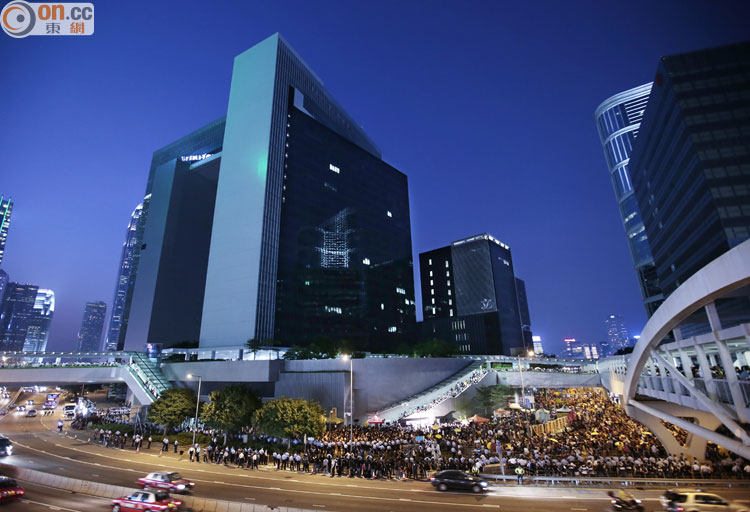
Many pro-Occupy organizations gathered and
held up yellow umbrellas for ten minutes at 5:58pm. The group dispersed at
about 7pm. The police said that there were about 1,100 persons around
Government Headquarters today. About 180 were anti-Occupy demonstrators, and
920 were pro-Occupy. The organizers said that they did not count the number of
attendees but they were satisfied that so many turned up in spite of the
suppression. As for People Power's attempt to charge onto Harcourt Road, the
organizers said that they were too busy with their own assembly and did not
pay attention to these other folks. The organizers said that there needs
to be clearly articulated goals for any Occupy activity, otherwise the
public won't know why.
Photos:
The Umbrella Movement, one year later The Big Picture
Videos:
dbc
https://www.youtube.com/watch?v=nFCSUqFCm6I
dbc
https://www.youtube.com/watch?v=yUBZZABP0Dw Oust the Pan-Democrats
march
ATV/NOW TV
https://www.youtube.com/watch?v=U5gkvYqR0UM News reports
INT News Channel:
https://www.youtube.com/watch?v=4Xlbb4ki0CY Occupy Central Trio Chan
Kin-man, Benny Tai and Chu Yiu-ming
INT News Channel:
https://www.youtube.com/watch?v=PHc6mJZFQPk Law37 and Joshua Wong
INT News Channel:
https://www.youtube.com/watch?v=OBJdRJ-Hiz0
Resistance Live Media:
https://www.youtube.com/watch?v=rDdOU9v3SmY Demonstrators said that
they want to charge onto Harcourt Road. All talk and no action.
Internet comments:
- Here is the "slippery
road" argument of the day: "Today, they used tear gas against us;
tomorrow they will massacre us all." Therefore the man is out here
raising his yellow umbrella, as if that helps to stop the massacre to come. I guess the police ought to shoot all
these people, because today they are chanting slogans; tomorrow they will be
detonating nuclear bombs (or something).
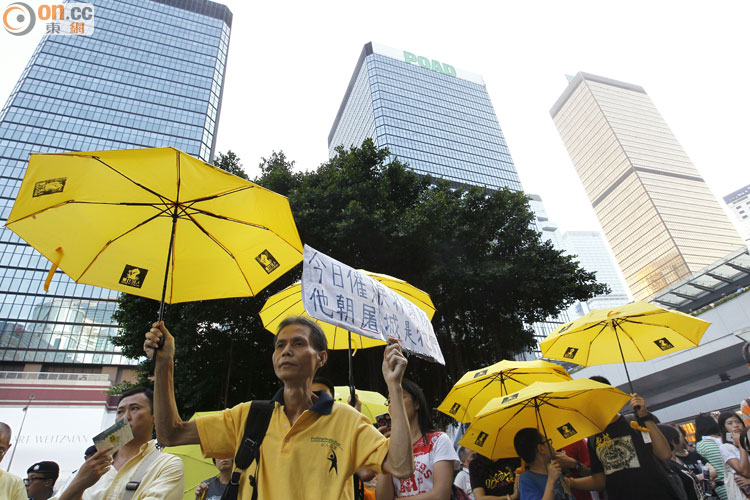
Video:
https://www.facebook.com/socrec/videos/1227626740597588/?fref=nf
- Comedy of errors by "Female
Long Hair" Lui Yuk-lin: At 7pm after the moment-of-silence assembly was over,
Lui attempted to release a
sky
lantern with the words "I want genuine universal suffrage." The police
told her not to, but she ignored them. But before Lui even released the
lantern, it had already caught fire. The police had to use a fire extinguisher
to put out the fire.
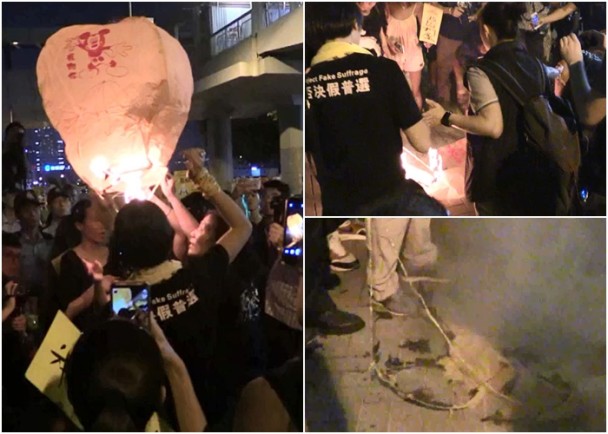
Video:
https://www.youtube.com/watch?v=F9xqyhcj-0g
- They are just kidding when
they said that they didn't care about the numbers. It is true that they don't
really care about how many showed up. What they really care about is how much
money was donated by the attendees. The organizers aid that they hope to raise $2
million to pay for the legal fees of those are being suppressed politically
for their Occupy Central activities.
- When asked about the police estimate of 920 pro-Occupy demonstrators, Civil
Human Rights Front convener Daisy Chan said that the people know the truth and
will not believe in the police estimate.
- Yes, I wouldn't believe the police either. My primary school has 1,000
students. So how could an Occupy Central assembly have fewer attendees than
the student body? No, sorry, I can't accept that.
- There were more people in the 1,200-person Chief Executive election
committee, which is therefore more representative than these 920
demonstrators.
- If they hold the police in such contempt, why did they bother to apply for a
"no-objection" notice from the police to hold this assembly?
- $2 million donations from 920 persons, which works out to be an average of
$2,000 per capita. These must be very wealthy students. But didn't they say
that they can't even make a living and that was why they have the special
responsibility to take action?
- 920 persons coming from 12 organizations, which works out to be fewer than
an average of 80 per organization. What kind of organizations were those?
- Oh, you don't get it, each of the 12 organization has around 700 people. The
total was only 920 due to overlapping memberships. Haven't you noticed that
they are always the same old faces?
- Lost at sea:
(881903)
Former Federation of Students
secretary-general Alex Chow said that seeing so many resisters gathering again
proves that people never give up and everybody has not abandon the goal of
getting democracy. He believes that the chances of another Occupy action today
are remote, because citizens know that this is not the right moment for a
large-scale Occupy action again. He thought that the group that planned to
dash out onto the roadway is only making a symbolic gesture.
--- First law of valiant resistance: Never
go back and say what might have been if only we did it earlier/later/not
at all. If you want to do it, you can do it this very moment. There is
never any right moment that can be chosen. Instead, you take the action
and you create the moment.
--- Alex Chow is still confusing Occupy Central/Occupy Movement/Umbrella
Revolution/Umbrella Movement with the Democracy project. They are not the
same. Public opinion polls have consistently show that the majority of the
people of Hong Kong want 'democracy' but also the majority of the people
of Hong Kong want Occupy Central to shut down and go home. The people agree
with the goal but not the method. Veterans like "Long Hair" Leung
Kwok-hung must know that there is no hope for a social movement to succeed
when the masses are against it. But the students are too arrogant to
listen to such advice back then, and they still don't get it even now.
--- The group that planned to dash out onto the roadway is not making a
symbolic gesture; this is an election campaign stop for them.
--- Scholarism convener Joshua Wong said that
they had expected 10,000 people to participate in the Occupy Movement last
year, but ultimately 200,000 came. He thought that was a miracle. He hopes
that Hong Kong politics will be different by September 28 next year.
--- The students wrought a miracle to
whittle the 200,000 down to 920. The students were arrogant, they offended
everyone and they made all the wrong decisions.
--- Last year: 200,000. This year: 920. Next year: 30. Yes, that will be
different.
--- (Oriental
Daily) September 29, 2016. About 200 persons opened up yellow
umbrellas and stood in silence at 5:58pm to commemorate the second
anniversary of the Hong Kong police firing teargas at demonstrators. They
said that they will continue to hold commemorative meetings until "genuine
universal suffrage" arrives.
- Tam Tak-chi (People Power) said that he would
bring 1,000 people onto Harcourt Road to block two lanes of vehicular traffic.
Since there were only 920 people, he didn't do it. It has nothing to do with
cowardice (about getting clubbed on the head by police batons and hit in the
eyes by pepper spray). It is because the people let down People Power.
- (Wen
Wei Po) People Power did not apply for a "no-objection" letter from
the office. So they deliberately set up their megaphone stand close to the
Civil Human Rights Front's grand stage. Thus People Power intentionally
blended in with
the others. In addition, People Power planted their party flags all
over the street, making it seem as if everybody came to attend their event.
- Tam Tak-chi is said to harbor aspirations
for elected positions (District Council/Legislative Council) in Kowloon East
district. Today's event says that his base support is only several hundred
persons at most across the entire region. He needs to be better known, but he is not the brightest
light bulb. Anything he tries (such as today's event) only brings more
negativity. And he has to be careful because a criminal conviction will
cause him to lose his position even if elected. What can he do?
- The ideal situation is for Tam Tak-chi
to get arrested and jailed for a period of less than three months. That
would make him a folk hero without disqualifying him from electoral
office.
- (Passion
Times) Tam Tak-chi said that his planned action reflected
co-existence. He only wants to occupy two car lanes so that the cars can use
the remaining lanes. But he has to get onto the roadway no matter what, because
that is the only way to make a show of force in front of the people of Hong Kong.
Thus, this is a self-restrained action of expression. But the action did not
take place. Tam said that he saw the police formation and was worried about
unnecessary injuries if the police use batons and pepper spray. Therefore he
called off the action. However he disagrees that the action was a failure.
- (Wen
Wei Po) Even as Tam Tak-chi was unable to get past the police line, a dozen or
so masked Civic Passion member began to holler from behind: "Tam Tak-chi, we
support you to charge! Please do not disappoint me by bailing out!" They
also chanted: "They tell other people to charge, but they don't charge
themselves!" There were numerous quarrels but no physical clashes. Finally,
after about one hour, Tam Tak-chi chose to bail out and leave his supporters
behind.
- (Born
In Chaotic Times Facebook)
--- Tam Tak-chi was in
Admiralty earlier. At the time, he was leading citizens to charge the police line. One
hour later, here he is Mong Kok already. He told the media that he spotted the
police putting on "gloves with hard objects" and therefore he called the
action off so as to avoid serious injuries to citizens. He does not consider
the action a failure. He believes that an action should not be evaluated by
success/failure; instead it is about whether experience was gained during the
process.
--- Because
the news was that Tam Tak-chi was eating at the Mui Kee Congee Restaurant
in Mong Kok, a large number of citizens went there to demand Tam to
fulfill his promise. The police were called and the citizens had to leave.
Tam eventually left through the back door.
--- At 22:00, the People Power's Shopping
Revolutionaries cursed out other demonstrators for wearing surgical masks
and therefore must be police moles.
--- At 23:00, the other demonstrators demand the People Power members
apologize for what they said before. The People Power members told these
other demonstrators to take off their masks before speaking.
--- The issue of masks first surfaced
several months ago. At the time, the Shopping Revolutionaries posted this
policy statement:
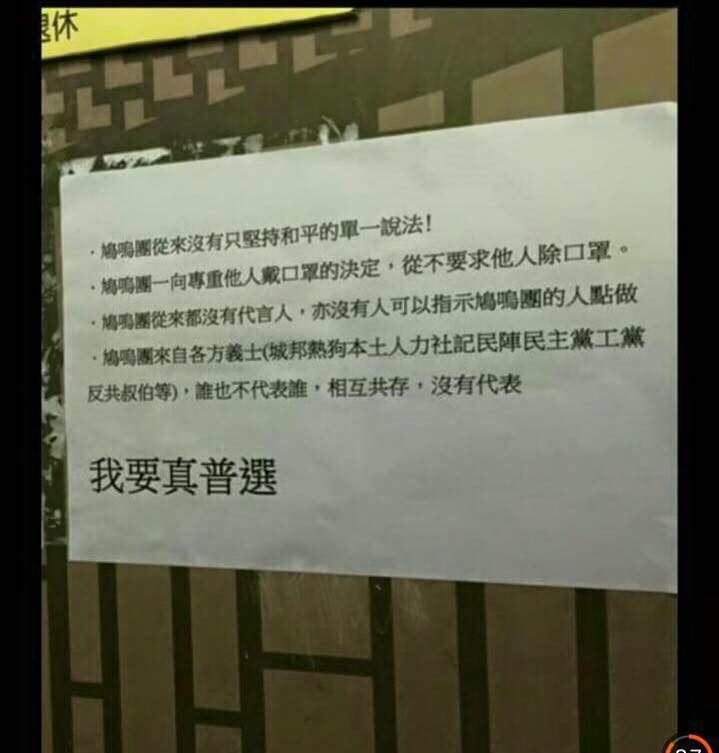
In translation:
-
The Shopping Revolutionaries
have never insisted on the single approach of insisting on peacefulness!
-
The Shopping Revolutionaries
have always respected the decision of other persons to wear masks. They never
demand others to remove the masks.
-
The Shopping Revolutionaries do
not have spokespersons, and nobody can instruct what the Shopping
Revolutionaries about what to do or not.
-
The Shopping Revolutionaries are
justice fighters from all over the place (City-State, Civic Passion, Localists,
People Power, League of Social Democrats, Civil Human Rights Front, Democratic
Party, Labour Party, various anti-Communists uncles, etc). Nobody represents
anyone else. We co-exist. We have no representatives.
-
I WANT GENUINE UNIVERSAL
SUFFRAGE
But that was before People Power
took over the Shopping Revolutionaries and used them to further their own
political agenda.
(Facebook)
https://www.facebook.com/1640482902830291/videos/1665791143632800/ In
April 2015 on Sai Yeung Choi Street South, People Power (including Auntie
Chin) was surrounded by a large number of citizens for smearing those localists who wore masks at demonstrations. People Power members eventually
left under police escort. People Power members hurl insults at the
police all the time but once they are in trouble themselves, they seek police protection.
--- The
next night, four hundred people showed up during the regular Shopping
Revolution meet. Except many of those who came are from competitive
radical organizations who want Tam Tak-chi to fulfill his promise of
occupying Harcourt Road. The regular Shopping Revolutionaries told them that
they don't know who Tam Tak-chi is. This is wildly hilarious.
- (Passion
Times) September 28, 2015.
"Are you coming with me to the
anniversary event for Occupy Central?" The message came. I was upset by this
message. Why are they still calling it Occupy Central? Was Central ever
occupied? Or are they talking about the Occupy Central when the ground floor
of the HSBC building was occupied in mid-October 2011? If it is the Occupy
Central that the Occupy Central trio talked about, then it lasted only one day.
That is because they told people to leave even as the police were still firing
tear gas canisters.
This
is the anniversary of the 9/28 incident. One year ago today, a bunch of
unarmed warriors went into the streets and were showered with 87 tear gas
canisters. The live television broadcast was still vivid in memory. After the first
tear gas canister was fired, I expected the people to scatter and not
return. Surprisingly, they scattered and then they fearlessly returned. My
heart was pounding and tears came out of eyes.
One year later today, as expected, the
pan-democrats held a commemorative ceremony in Admiralty. It was a happy
scene in a sea of yellow, with yellow ducks, yellow belts, yellow ribbons,
yellow flowers and free t-shirts. If my school's Fun Fair (=Carnival) had
as many fine gifts to hand out, it would be marvelous. My school has a lot
to learn from these people. This show must have taken up a lot of effort
and money, right? It is disgusting that these politicians would spend so much time
and energy on these useless vanity and aura instead of something truly useful.
It is one thing to pass out presents, but it
was absurd for them to raise the yellow umbrellas and sing "Me Today."
With due respect, they are just a bunch of fools who raise their umbrellas
(note: they would be waving their mobile phones if this was nighttime),
sing some karaoke songs and disperse peacefully afterwards. They bring
disgrace to Beyond because they have caused the Beyond songs to be branded as "leftist
retard." I do not completely negate the value of commemoration. But their
vanity and narcissism constitute a betrayal of those warriors who were hit by the
tear gas last year. The government officials must be thinking: "When they
finish singing, they will leave."
I am such a secondary school girl. My own
contribution was to hand out mineral water at the supply station. I was not
hit by tear gas on 928. I did not stay overnight. I did not sleep many
nights on the road without taking a shower. I was not clubbed on the head
by the police. But I would never attend the commemorative ceremony in
Admiralty in order to make the politicians look good. Please do something
useful, or else Hong Kong will never have genuine democracy and autonomy.
I remember that on the day of clearance
after 79 days of the Occupy Movement, there was a long banner with the
words "We'll be back." One year has elapsed. When will we be back?
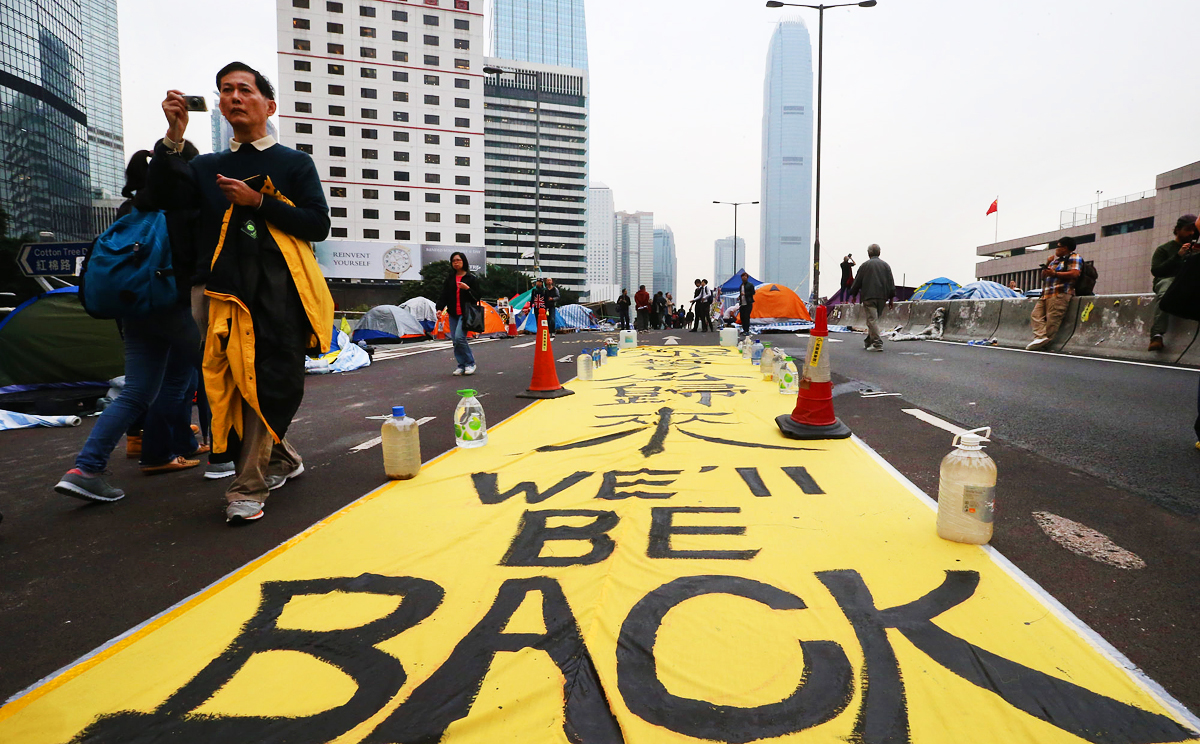
- (SCMP)
One year after Occupy Central, the world is no longer buzzing to support Hong
Kong's democracy. By Michael Chugani. September 30, 2015.
A year ago, the city was raw
with anger. Live television images of riot police raining tear gas on citizens
had seared the public psyche. A defiant uprising that came to be known as the
"umbrella movement" lit the world's imagination, pushing Hong Kong into the
glare of the international media. The movement's leading players boastfully
declared "the eyes of the world are on us" - a warning to Beijing and the
Leung Chun-ying administration not to crush the uprising. The world indeed was
watching. Tent communes occupying key districts and a sea of yellow umbrellas
fascinated the foreign media and spooked foreign leaders who feared a colour
revolution that would be crushed by the People's Liberation Army.
Well, the
world has lost interest. If it really cared, wouldn't it have been opportune
on the first anniversary of the democracy uprising for Barack Obama to press
for Hong Kong's case during his recent summit with President Xi Jinping ? He
didn't, even though the US is supposed to champion global democracy.
The harsh
reality is that Hong Kong is on its own in its fight for democracy. Will
history judge Occupy as a success or failure? The jury is still out. But
pro-democracy politicians are already running scared about how voters will
judge them in the upcoming elections for their roles in the uprising. Most
shunned Monday's ceremony marking Occupy's first anniversary. This is
puzzling. If they believe occupying parts of the city for 79 days to press for
democracy had the people's support, they should be cocksure of winning instead
of fearing what they did has become political baggage.
- At this time, it does well to
remember what happened afterwards. On June 28, 2015, the 28 pan-democratic
legislators vetoed the constitutional reform proposal. By virtue of that veto,
the Chief Executive will continue to be elected by the old method of 1,200
election committee. The pan-democrats promised that they would re-start the
five-step constitutional reform process immediately to get a new election
system with civil nomination.
Well, this is three months later. ABSOLUTELY NOTHING HAS HAPPENED SO FAR. AND
THEY DON'T ACT AS IF ANYTHING WILL HAPPEN EITHER. Like CY Leung, the
pan-democrats must think that talking about something is the same as doing it.
The restart would require the
Chief Executive CY Leung to act and the National People's Congress Standing
Committee to go along with him. Leung is in no haste to proceed, and there is
nothing that the pan-democrats can do except to filibuster livelihood issues
at the Legislative Council and blame CY Leung/Chinese Commies for the
resulting pain.
- By inflicting pain on the people, the pan-democrats will make CY Leung pay.
Revenge is so sweet!
- (SCMP)
Two years on: Hong KongÆs Occupy but not so much love and peace. BY Michael
Chugani. September 27, 2016.
Not that it matters, but today is the
second anniversary of the start of Occupy Central with Love and Peace. Love
and Peace? John Lennon would grimace in his grave. If you know of any love
and peace parked somewhere in our politics, please Google me a map.
Political correctness requires us to accept
that Occupy was an exemplary example of peaceful civil disobedience. Yes, it
was mostly peaceful. But those unafraid of the truth know the 79-day
uprising wasnÆt exactly marked by flowers in your hair.
The images we saw were not of occupiers
planting roses on the batons of policemen or flashing peace signs. Occupy
images ingrained in our memory are of battles between the two sides:
teargas, pepper spray, blocked traffic and attempts to break into the
Legislative Council.
One side wore police riot gear, the other
helmets, makeshift shields and body armour. Which side started the sporadic
episodes of violence is open for interpretation but blaming the police alone
is morally dishonest.
Love and peace do not belong in the same
breath as Occupy, but the opposites of the two words certainly have a place
in OccupyÆs offshoots. Only those uncomfortable with the truth would fault
you for using hate and violence to describe the Mong Kok riot. OccupyÆs
other offshoot û the independence movement û prides itself on the
willingness to use violence to achieve its aim. Hate fuels the ABC û anyone
but CY û campaign.
This particular offshoot most baffles me.
It reshapes our entire politics into a bizarre entity of hate directed at
one man. ABC didnÆt exist when law professor Benny Tai Yiu-ting first
conceived Occupy in 2013 to press for so-called true democracy.
Beijing countered with a restrictive August
31, 2014 reform framework that centred on screening chief executive
candidates. Occupy was Hong KongÆs middle-finger response to Beijing. Will
ABC û which is essentially shooting the messenger û nullify BeijingÆs August
31 ruling which sparked Occupy?
ABC instigators say dumping Chief Executive
Leung will at least heal the division in society. Sure, and the moon is made
of green cheese. Leung is combative, but solely blaming him for our
political polarisation is avoiding the truth.
Half of Hongkongers hate their communist
masters, want so-called true democracy as a shield and want China to be a
sovereign only in name. Beijing has responded to our middle finger with a
fist. This stalemate is the real root of the political mess we are in.
(Passion
Times) September 25, 2015.
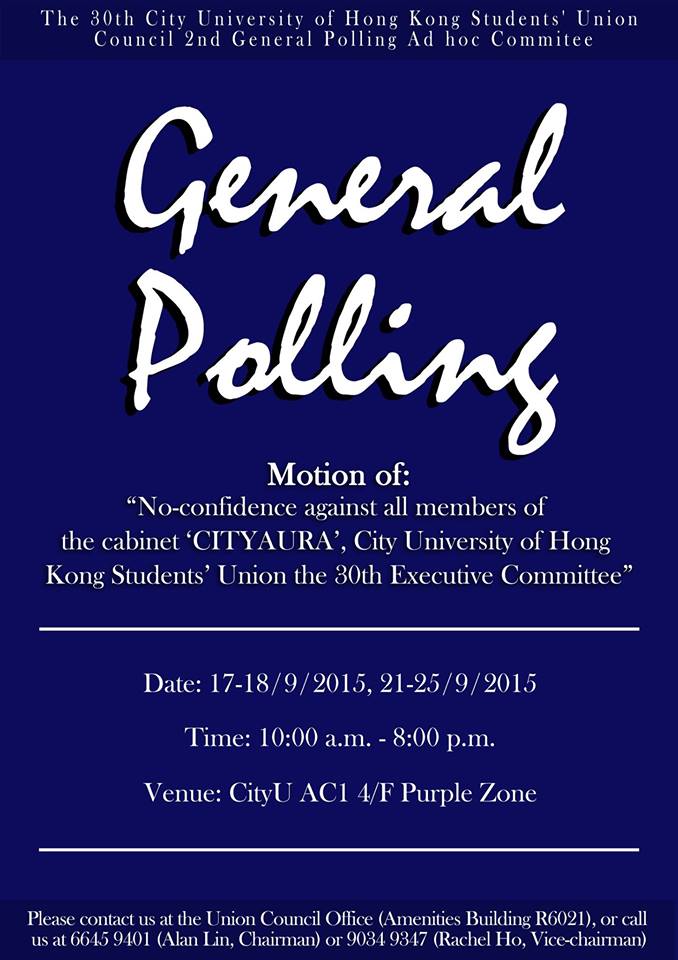
City University has been in existence for 30
years. The 30th Executive Committee consisting of the cabinet "CITYAURA" has
just been recalled based upon a no-confidence vote. Previously, 1,200
signatures from students were gathered to start this referendum. After seven
days of voting, the results of this referendum are:
Total number of votes = 2662
Number of votes for = 2,206
Number of votes against = 317
Abstentions = 86
Null votes = 52
Thus the motion was passed and
the entire executive committee is ousted.
According to the Impeach City University
Student Union Concern Group member Haley Lai, the executive committee laid
down many obstructions on the way. As a result, the referendum was postponed
until the current academic year. This meant that the graduating seniors lost
their chance to vote and the freshmen were thrown into this process without
much knowledge of the issues. Therefore, Haley Lai was pessimistic. As it
turns out, the motion received overwhelming support (2,206 against 317),
which showed the gross unpopularity of the current executive committee. New
elections are scheduled to be held in December. A temporary executive
committee will be formed under the University Council president.
Internet comments:
- The first major strike against
the CUSU executive committee took place last may when the president Cyrus Chu
refused to sign off on the signature campaign for the referendum to withdraw
from the Hong Kong Federation of Students. The referendum was eventually held
(see #237). That
campaign featured many cheap tricks. The most egregious example is this: the
Student Union was responsible for publicizing the referendum and indeed they
did with a large wall banner:
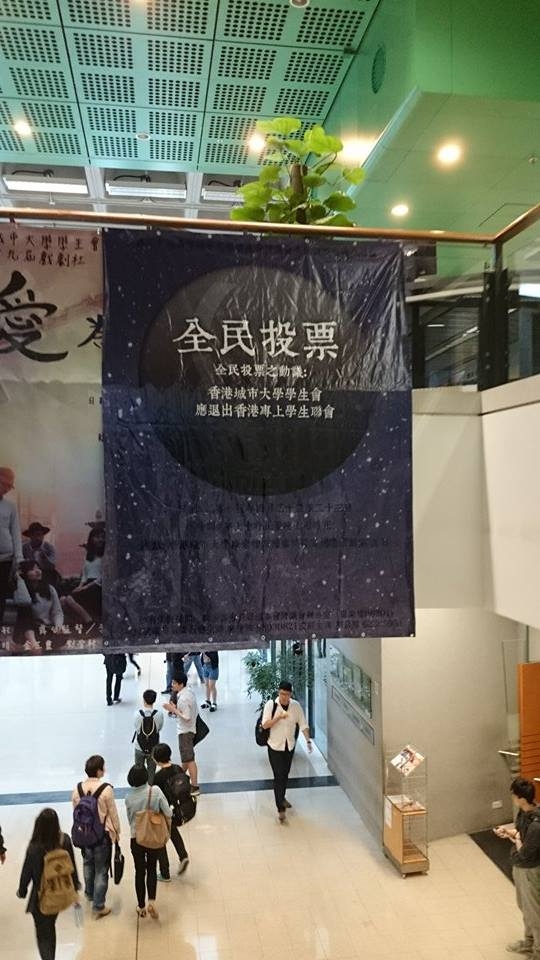
The photo shows the banner to call on students to vote. The white letters are:
Plebiscite: The City University Student Union should leave the Federation
of Students? The details (such as time and place) are provided in the text
below. Unfortunately, the details are black letters written on a black
background! In other words, the election organizers have followed the letter
of the law by spelling out all the details except nobody can read a thing!
The results of that referendum were:
Total number of votes = 3,290
Number of votes for = 2,464
Number of votes against = 527
Abstentions = 174
Null votes = 72
Therefore, the City University
Student Union is no longer a member of the Hong Kong Federation of Students.
Because of the cheap tricks used by the executive committee, some students
started the no-confidence motion referendum against them. The size of the
landslide victory of the first referendum meant that the CUSU executive
committee would likely lose in no-confidence motion. Hence came all the cheap tricks
again.
The second major
strike against the CUSU executive committee took place at the Conrad Hotel,
where there was a ceremony to celebrate a $200 million donation from
businessman Yeung Kin-man to City University (see
#319).
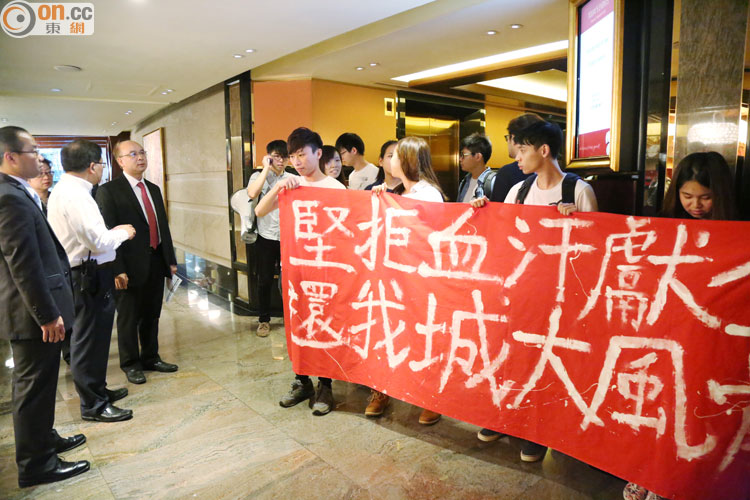
The City University Student
Union said that they suspect that there are political aims behind this sudden donation.
Accepting the money will destroy the autonomy of the university, including
personnel appointments. They demand that the university authorities reject
the donation. "Firmly reject blood-and-sweat donations, give integrity back
to our City University" was the banner that they carried. The university
administration angrily responded, pointing out that the City University
Student Union was aware but deliberately refused to mention that $50 million
of that donation was specifically earmarked to enable students to go on
overseas exchange programs.
In between those two major
strikes are some lesser strikes, such as the executive committee taking
$30,000 from the university to go on a trip to Japan which has more to do
with pleasure traveling than any duty. And then there was the lead-in-water
challenge (see #302).
- Eh, you missed the most
egregious mistake of this executive committee. They screwed up on the annual
computer festival. This was very important for the students, because they
get to buy computers at sharply discounted prices. Even if they don't use
those computers, they can always sell them for considerable profits. But now
the students have nothing.
- On one hand, some people are
sure to argue that these City University referenda show that democracy works
because an unpopular executive committee was ousted by democratic processes.
On the other hand, other people will argue that this shows the opposite is
true. First of all, the turnout was only 15%. Who are the 85%? They could be
people who came to City University to study and don't want to be bothered by
any so-called social activism. They could also be people who know all about
social responsibilities, but despair of a system that will replace one group
of wastrels by another. When this so-called democratic system fails to
engage 85% of the base, it is not working.
- The CITYAURA cabinet is
running up against a mixture of opponents.
(1) There are Valiant Warriors who think the CITYAURA people were wrong to
align themselves with the leftardist (=leftist retard) Federation of
Students. They want a new executive committee that will engage in Valiant
Resistance by Force against the government.
(2) There are pro-China/pro-establishment students (such as the mainland
students) who thought the CITYAURA people were wrong to align themselves
with the rebellious Hong Kong Federation of Students. They want a new executive
committee that is less focused on political issues and more focused on
livelihood issues.
(3) There are politically neutral students who are simply disgusted by the
series of cheap tricks used by CITYAURA.
Meanwhile, CITYAURA supporters are few in numbers.
This breakdown is the same
opposition line-up that the pan-democrats will be facing in the upcoming
elections.
(1) There are Valiant Warriors who think that the pan-democrats' system has
failed to deliver after 30 years, and therefore it is time to engage in
Valiant Resistance.
(2) There are pro-China/pro-establishment voters who think that it is a
patriotic duty to vote against the pan-democrats.
(3) There are politically neutral voters who are simply disgusted by Occupy
Central, Shopping Revolution and Reclaim XXX. They want to elect people who
are less political and more focused on livelihood issues.
So do the pan-democrats have a strong enough base to survive?
(Oriental
Daily) September 26, 2015. (Wen
Wei Po) September 27, 2015. (Oriental
Daily) September 27, 2015.
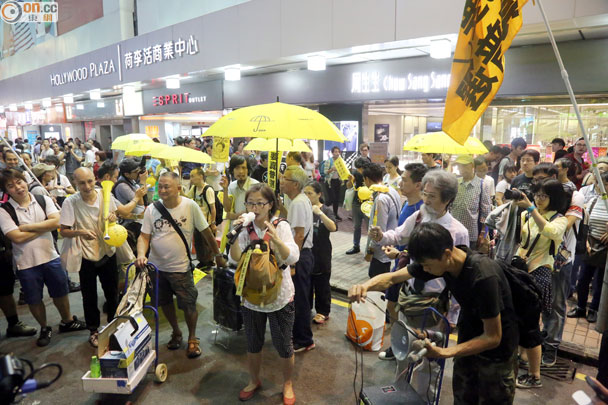
With the anniversary of Occupy Central near,
the Shopping Revolutionaries planned to march from Mong Kok to Tsim Sha Tsui
to Government Headquarters in Admiralty. They anticipated 100 attendees, but
there were only about 20 persons present. Meanwhile, the police (including uniformed
officers, plainclothes anti-triad team members and PTU members) numbered 60
to 70.
Those present
today carried yellow umbrellas or yellow lanterns, shouting "Don't forget
our original intentions, let us hold hands together and march, we shall return to
Admiralty". These present included Leung Kam-shing, the Chalk Girl, Captain
America, etc. The marchers started out at 710pm, proceeded to the Star Ferry
terminal in Tsim Sha Tsui and took the ferry across the harbor to Central. As more
joined in along the way, their numbers swelled to 60 to 70 (including the
so-called "photojournalists"). About 50 police officers accompanied them.
Along the way at Haiphong Road, a citizen
annoyed by the commotion told them to shut up. There was an argument but the
police quickly calm things down. Shopkeepers along the way were negative. In
Mong Kok, a dispensary workers said "this type of action is pointless" and
"Do you see any customers come in while they march?" In Yau Ma Ti, retailer
Mr. Chiu said the Shopping Revolutionaries have caused his business income
to be down by 70% over the past year. In Tsim Sha Tsui, a fashion store
worker said that the Shopping Revolutionaries have caused her revenue to be
down by 20% because their pointless actions are disturbing peace and order.
(Oriental
Daily) September 26, 2015. (Wen
Wei Po) September 27, 2015. (Oriental
Daily) September 27, 2015.
At around 930pm, about 30 to 40
Shopping Revolutionaries reached the Legislative Council. The Federation of
Students and Scholarism were holding an 8-hour long seminar there, featuring
social activists, scholars and Occupy Central founder Chan Kin-man. During the
early afternoon there were about 20 to 30 people in the audience.
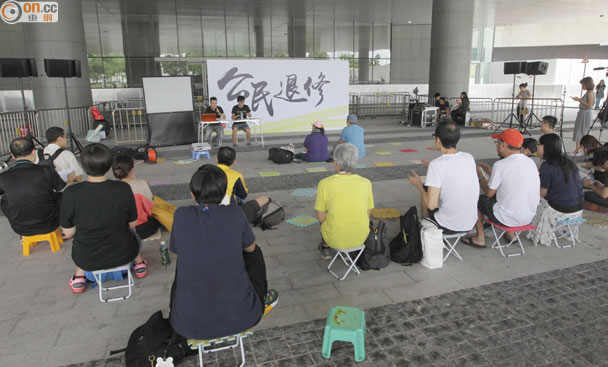
By the evening, the audience grew to 60 to 70
persons, most of whom are middle-aged persons with very few young persons.
The two groups met up, the student groups applauded, but the Shopping
Revolutionaries said "We are not welcomed here" and went ahead to Government
Headquarters. There they tossed balls at paper dolls of government
officials. The Shopping Revolutionaries demanded that Civic Plaza be
re-opened to the public. They also assured the police that they were too
fatigued to scale the wall and do so themselves.
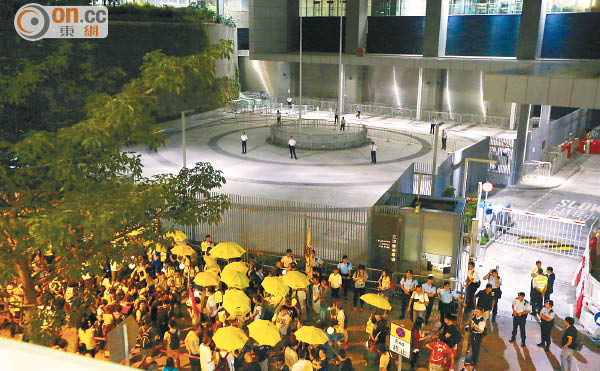
Afterwards Federation of Students
secretary-general Law37 and Scholarism member Agnes Chow explained to the
press that it is not that they did not welcome the Shopping Revolutionaries
but rather they couldn't get anywhere with them. Later Law and Chow went
over to Government Headquarters to kiss and make up, but the Shopping
Revolutionaries cursed them out with foul language. It was a very awkward
situation.
(Hong
Kong Free Press) September 27, 2015.
Around 40 ôGau Wuö protesters marched from
Mong Kok to Admiralty on Saturday night to commemorate the anniversary of
pro-democracy Occupy protests. Jordan Chan, one of the organisers, told HKFP
that ômore people usually come out to protest on Saturdays, and we did not
want to clash with commemoration events by other organisations on September
27 or 28.ö
The rally started at around 7pm. Protesters
chanted: ôRemember our goal [of true democracy], walk hand in hand, we will
be back in Admiralty together!ö along the route. The protesters moved on to Tsim
Sha Tsui and boarded the Star Ferry to Central.
Demonstrators said they intended
to use the slogan ôretake the Civic Squareö, which was stormed on the same day
last year û an event that kickstarted the 79-day Occupy protests. The group,
however, had previously told police that they did not intend to storm the
square in an application letter for the eventÆs approval.
Outside the legislature, protesters urged the
government to reopen the square, calling it ôAdmiralty Prisonö as it was
fenced-off and guarded. ôIt belongs to the Hong Kong people, it was built
with our tax money, we have the right to get inside to protest,ö a protester
surnamed Chin said, ôThis government only knows how to destroy things but
not use them in the right way.ö
Coloured balls were then thrown at effigies
of China Liaison Director Zhang Xiaoming, Chief Secretary Carrie Lam, Chief
Executive Leung Chun-ying and Secretary for Justice Rimsky Yuen in protest.
The officials were depicted as prisoners, in reference to the protesters
calling Civic Square a prison.
...
The ôGau Wuö protesters started to gather
in Mong Kok nightly after the pro-democracy Occupy protest
camps were cleared in Mong Kok in November last year. The movement was
nicknames ôGau Wuö ù Mandarin for shopping ù as protesters claimed they were
in Mong Kok to shop. It followed a call from Chief Executive Leung Chun-ying,
urging people to help small businesses in Mong Kok affected by Occupy, after
the protests were cleared.
Videos:
(Apple Daily)
https://www.youtube.com/watch?v=0stVAwyXY24 News report
(SocREC)
https://www.youtube.com/watch?v=vRWDHG_Kn8M Speeches in front of
Government Headquarters. Law37 visits them.
(Resistance Live Media)
https://www.youtube.com/watch?v=0-l1dZBWL4M Marching down Canton
Road to Star Ferry to Admiralty.
(SpeakoutHK)
https://www.youtube.com/watch?v=ND6t_PxB7As Shopkeeprs criticize the
Shopping Revolutionaries.
Internet comments:
- This is "Captain America" Andy
Yung with a yellow umbrella. He did not bring his British Dragon/Lion
flag for Hong Kong independence, probably because they won't allow him to
carry it onto the Star Ferry.
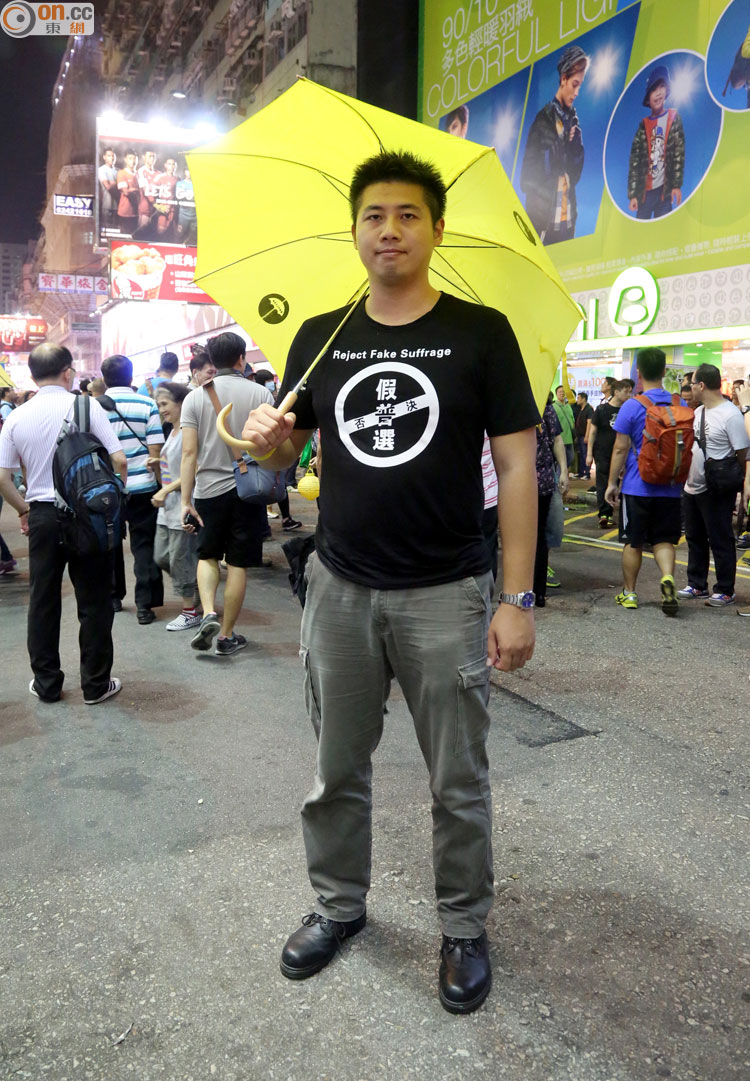
- Andy Yung is wearing a "Reject Fake Suffrage" t-shirt. Cable TV once
interviewed him: (YouTube
https://www.youtube.com/watch?v=YXryhmJcRcA).
2:14 (interviewer) What are the three barriers set up by the National
People's Congress?
2:16 (Andy) The three barriers? I don't know how to describe the
details. But ... I actually ... how shall I say? ... that is, I don't care
what barriers were set up by them. But I ultimately want to obtain the
right to genuinely elect the Chief Executive by one-person-one-vote. That
is, there has to be civil nomination.
That is to say, he has memorized
a bunch of keywords but has no idea what they mean when taken together.
- I wonder what the purpose is. Do you think
that this 20-person-strong march is going bring this "genuine universal
suffrage" thing any closer? No one would realistically think so. So why are
they doing this? Because they feel good. Twenty years later, there just may
be a "genuine universal suffrage" because or in spite of their efforts, and then they
will move on to protest something else. This will never end, because their
pleasure is to show up every night and yell something or the other. The
substance is immaterial. Only the action is important. This is called
Existentialism.
- They started out tonight at 710pm. These
Shopping Revolutionaries normally begin their "shopping" expedition around
10pm, after most shops are closed. During Occupy Mong Kok, the occupying
force at least had the decency of turning down the volume after 10pm. These
Shopping Revolutionaries are the opposite, because they begin their work
after 10pm.
- They choose the 10pm start time in order to maximize impact on local
residents and minimize impact on local businesses. They are Shopping
Revolutionaries and their mission is to stimulate the local economy?
- They know to leave when they feel that they are not welcomed? Is this a
joke? Do they think that the shopkeepers and commercial drivers welcome
them?
- I saw this
photo:
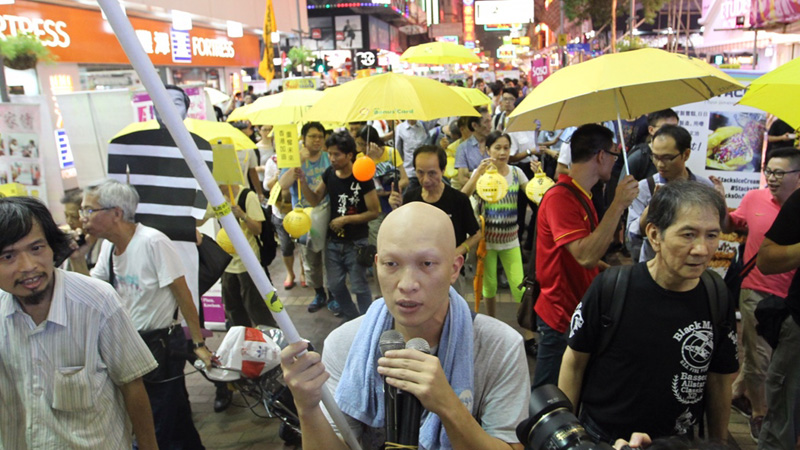
Where do they find these people? Is that
Lord
Voldemort in the middle? If they are leading a revolution, then I'm
not following.
- They fit right in with the high-income, high-education and young-age
profile of Yellow Ribbons.
- (RTHK)
I understand that Law37 wants the best of both words. When asked about the
poor attendance at these seminars, Law37 told the media that the audience
size does not matter and the important thing is the exchange between the
speakers and the audience. After all, this is a seminar and not a mass
mobilization to pressure the government. He said that the believes that most
people are staying at home in order to let the meaning of Umbrella Movement "settle
in."
(Ming
Pao) No End To HKU Crisis. By Kevin Lau. September 24, 2015.
On September 29 (Tuesday), the
HKU University Council is expected to vote on the appointment of the Pro
Vice-chancellor of Academic Staffing and Resources. The Alumni Concern Group
has made many efforts, but so far has only gotten the support of about 8
of the 21 council members. The pro-establishment side has 12 council members.
It is estimated that the person recommended by the committee headed by HKU
President Peter Mathieson (namely, former Law School dean Johannes Chan) will
be voted down by the University Council. Some HKU senior staffers are worried
that the appointment decision will only mean that the crisis is just beginning
instead of stopping.
According to the private communication from one relatively open-minded
university council member, many council members either don't dare or are
unwilling to vote for Johannes Chan's appointment. The main reason is that
the Beijing authorities have expressed their opposition through the official
media. So if they vote for the appointment, Hong Kong University may be
subjected to retaliation. The current frequent academic exchanges and
cooperation will be hit, business and government subsidies will fall, and
then HKU will be surpassed by other local universities within a few years.
But this council member also privately
admitted to close friends that even if the university council does "the
right thing" this time to vote down Johannes Chan's appointment, it does not
mean that the central government or the Hong Kong SAR government will forget
the past and spare them. From now on, the appointments of the Pro
Vice-Chancellor, the Provost and even the extension of the contract for the
Vice-Chancellor will need the approval of the governments before the
pro-establishment members of the University Council will vote to approve. In
the face of such huge political pressures, the administrative autonomy of
the Hong Kong University and academic self-determination are likely
unsustainable.
[...]
(Wen
Wei Po) September 25, 2015.
In February this year, former
Ming Pao chief editor Kevin Lau reported that the HKU selection committee
unanimously recommended Johannes Lau as the pro vice-chancellor for academic
staffing and resources. In July this year, Lau reported that Arthur Li got a
middleman to "persuade" Johannes Chan to withdraw and this caused the students
to riot. Time and again, these allegations were shown to be lies. Yesterday
Kevin Lau offered yet another exposÚ. How credible is it? Maybe Kevin Lau does
not know that he is "crying wolf," but Ming Pao placed his article in the
corner area and also did not provide much follow-up reportage.
The Lau article yesterday is
self-contradictory and deceptive. Lau said that many council members "either
dare not or are unwilling" to vote for Johannes Chan's promotion. This
creates the impression that the council members are being pressured. But if
you parse the language carefully, you will notice that both "dare not vote
for" and "are unwilling" are grouped together. "Dare not vote for" may be
construed as "being pressured", but "unwilling to vote for" clearly means
that the voter does not approve of Chan's character or thinks that Chan is
unqualified for the pro vice-chancellor.
The former is supportive, whereas the latter is
oppositional. So how can Kevin Lau's sophistry group the two together.
Even those who opposed Chan are said to be worried that HKU will face
retaliation? Did Kevin Lau deceive even himself to think nobody would think
that Chan lack academic leadership, or was involved in the "secret
donations" affair such that his integrity is in doubt?
Kevin Lau said that "if the appointment is
approved, HKU may be subject to retaliation." Let us suppose that this is
true. Next Kevin Lau said that "even if the appointment is vetoed, it does
not mean that the central government and the Hong Kong SAR government will
spare HKU." One does not know whether to laugh or cry? No matter whether
Johannes Chan is appointed or not, HKU will face retaliation. Such being the
case, the council members have no exit. So if they genuinely support
Johannes Chan, how could they "not dare" vote for him?
By this point, the smart readers will see that
Kevin Lau is running out of tricks. He wanted to use "facing retaliation" to
inflame emotions. But the careful reader will remember that in the previous
episodes, Kevin Lau was saying that the central government "actively
attacked", "attempted persuasion" and "applied pressure." But now that the
vote is coming, they have done nothing except for some articles published in
the official media. Meanwhile the only thing is that the council members got
worried by thinking on their own. Did someone forget what he lied about
previously?
Finally, let us look at Kevin Lau's
"imagination." He claimed that "some people are worried" that if the
appointment is approved, then HKU will be "retaliated against," with lesser
government subsidies so that it will be surpassed by other universities. If
the appointment is vetoed, HKU will still be "retaliated against" and lose
its independence and autonomy, its president Mathieson will want to leave,
scholars won't come to HKU, HKU will be ruled by the pro-establishment camp
... any reasonable person will have to laugh at his slippery slope argument.
Even if Kevin Lau has no understanding about the government subsidy system,
the most direct question should be: Is HKU going to sink faster if Johannes
Chan who mishandled the donations and failed in academic leadership was
appointed? Or not appointed?
(Wen
Wei Po) September 25, 2015.
The appointment of the pro vice
chancellor ought to have been handled by the University Council with full
authority. Instead, the pro-democracy camp applied pressure on the council on
many occasions to appoint Johannes Chan, who was involved in illegal
contributions during the Occupy Central period. Yesterday former Ming Pao
chief editor Kevin Lau wrote another essay about how an open-minded council
member said that "many council members either dare not or are unwilling to
vote for the appointment of Johannes Chan. They were worried that HKU may be
'retaliated against'" in the form of reduced exchanges and cooperation with the
mainland and 'even reductions in government subsidies'." This is alarming but
Kevin Lau offered no evidence whatsoever. The essay then contradicted itself
by saying that even if Johannes Chan is not appointed, that doesn't mean that
the central government or the Hong Kong SAR government will stop.
Our reporter has made inquiries with the
various council members about Kevin Lau's essay. They said that they did not
experience
anything like that. The "relatively open-minded" council member Man Cheuk-fei said that he does not know what other council members are
thinking, but he himself hadn't seen the phenomenon of what Kevin Lau was
saying. He pointed out: "The voting is by secret balloting, so that the
council members shouldn't feel much pressure." Another council member
condemned Kevin Lau's assertions as being preposterous, emphasizing that the
council members are learned and principled individuals who won't be
influenced by others. He said that he did not personally come under any pressure.
(Wen
Wei Po) September 25, 2015.
Educational Policy Concern Group
chairman Cheung Man-bing said that if Kevin Lau has any evidence, he should
produce them, or else it is unfair to everybody. He said that the voting is
done by secret ballots, and there is no way to know how the 20+ council
members individually voted afterwards.
Hong Kong Federation of Education Workers
chairman Wong Kwun-yu said that Kevin Lau was obviously manufacturing
opinion in order to intimidate the council members: "He asserts that all
those who won't vote for Johannes Chan were coerced, and all those who cast
the NAY vote either capitulated or were gutless. In the final analysis, he
wanted them to vote for Johannes Chan. Why couldn't he make it blunter and
say: "Unless you vote for Johannes Chan, HKU will sink"? He needs to poll
one council member at a time to see if this is true, or else he is just
saying whatever he wants to say." Wong said that a news worker should not be
publishing speculations as fact. He wondered if Kevin Lau is taken advantage
of his job at Ming Pao to manufacture opinion, for that would be very wrong.
(HKG
Pao) September 25, 2015.
Recently, the HKU Alumni Concern
Group sent out a team of lobbyists to individually persuade the HKU Council
members to vote for Johannes Chan as pro vice-chancellor. They reminded the
council members that they must support Chan or else they will be guilty
of a "political crime" with unforeseeable consequences. This amounted to
political intimidation, and some council members found it to be most annoying.
The HKU Alumni Concern Group and other
supporters of
Johannes Chan have frequently said over the past several months that the
government or the China Liaison Office have been reaching out to the council
members. But the council members have not been contacted by any central
government or related persons. Instead, they are being lobbied by the HKU
Alumni Concern Group. So who is really interfering with the autonomy of the
university?
The
lobbyists tell the council members that if Johannes Chan gets appointed,
they will at most listen to a few days of criticisms from the
pro-establishment camp and it will all blow over with their reputations
intact. But if Johannes Chan does not get appointed, they will have to face
the wrath of the administrators, staff members, students and alumni with
unforeseeable consequences which not even the university can bear. This type
of lobbying is clearly a threat to the council members. The lobbyists even
positioned the appointment of Johannes Chan as the battle to defend the
100-year-old reputation of HKU. They said that if Johannes Chan is not
appointed, then the whole world will believe that HKU has lost its autonomy
and is obeying Beijing on everything.
A council member reached by the lobbyists
wondered, Does opposing the appointment of Johannes Chan mean that the
central government is exercising political control? But who is really
politicizing the whole thing here? As council members, they don't have any
political powers behind them. Therefore the lobbyists are insulting them and
their independence with this kind of talk. The lobbyists kept wanting the
council members to take sides. This is tremendously annoying and not
conducive for the council members making a reasoned decision. Another
council member said that a soon-to-retire council member was told by the
lobbyist to think about the pros and cons and avoid "losing his reputation
in his last years of life."
The lobbyists completely failed to mention
Johannes Chan's lack of academic accomplishments and involvement in the
secret donations scandal, while insulting their characters with this kind of
talk.
(The
Initium) September 22, 2015.
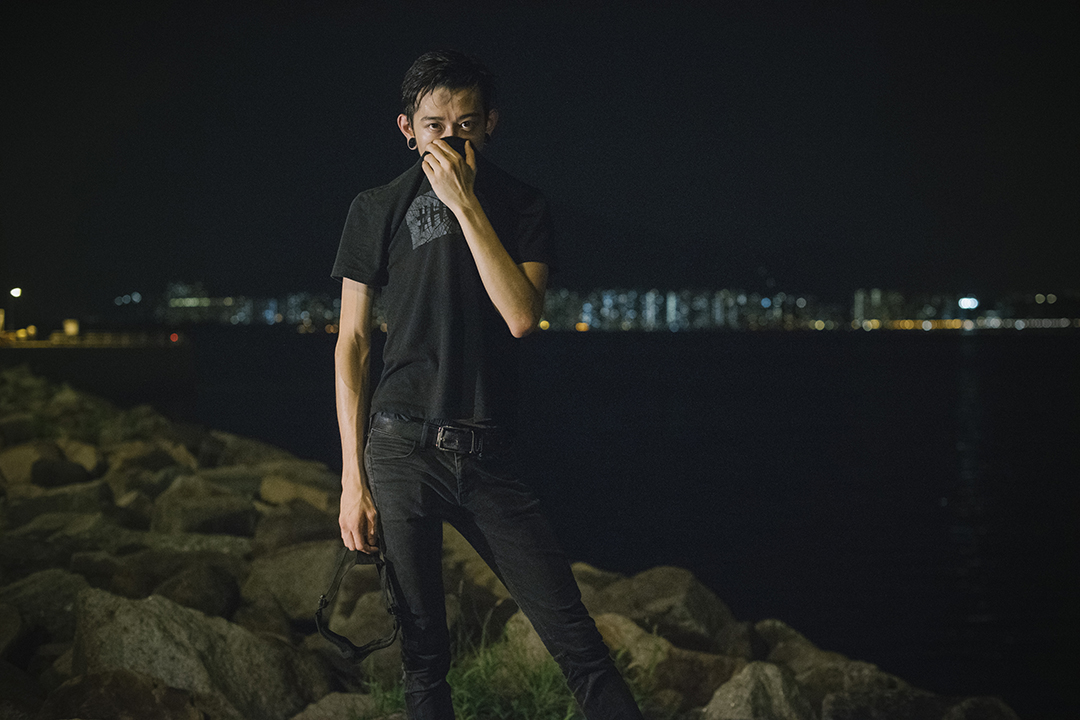
He said that he is known as Fire.
Pale, thin, black t-shirt and
black pants, so that he can hide easily in the darkness. Two large earrings
hang down from his ear lobes. It is not hard to notice that the ear lobe
piercings are almost 2cm long.
He is good-looking and
sometimes want to look handsome. He is an amateur artistic bicyclist. Hong
Kong is not a big place. He is like a small-town boy. He said that he comes
from Tai Po, he love the place, he knows it so well that he can walk around
with his eyes closed. Strictly speaking, he has never left there. He grew up
there. He graduated from secondary school and got all his jobs about the Tai
Po Centre area. He has make milk tea, sold Internet access, sold
electronics, sold clothes ... he loves to sell mobile phone most of all.
That is his current job, which pays a base salary of only $10,000. When
customers come in, he doesn't have to hard-sell them. He plans to save more
than one hundred thousand dollars in a couple of year and open his own
mobile phone store.
It was a late summer night at
the end of August. After getting off work at 10pm, Fire came with a
low-slung bicycle to the Waterfront Park, Tai Po. This is different from the
normal artistic bicycle, because it is painted black like a ghost warplane.
He built it up himself, and it is better than brand name models. It costs
him one month's salary.
I met Fire in mid-October
2014. It was late night in Mong Kok when the police and demonstrators were
both taking a break during a lull. He and many other resisters took off
their gear and sat down wearily by the roadside to rest.
When I spoke to Fire, he was
polite and friend. He and many others who stayed to defend in Mong Kok
consider themselves Valiant Ones for resisting the police and the unjust
system. The mainstream opinion classified them as "troublemakers" or as
fully-armored masked "moles" sent in by the Chinese Communists to radicalize
the Movement.
"The glory of the Admiralty
was gained with our blood. Never mind that, because it is alright by me. But
to say that the Valiant Ones are saboteurs? I was hit and I had to get
treatment at the hospital. Am I a mole?"
That was one year ago, and we
are now by the balustrade of the Waterfront Park and not in Mong Kok
anymore. But Fire is still angry.
"Peace, Reason, Non-violence,
Non-foul language?" He snorted. Although we were standing several meters
apart, I could still see the glint in this eyes.
"The government saw through
us. They ignored us completely. Those 'peace, reason, non-violence and
non-foul language' people eventually sat there and got arrested." He said:
"They are celebrities so nothing happens to them. We are nobodies. We have
to earn a living. We can't afford to sit down and get arrested."
This is the most controversial
aspect of the masked Valiant Ones: They choose to use radical methods to
clash with the police while criticizing the more moderate persons. To many
people, they are missing the willingness to accept the legal responsibility
in civil disobedience.
"If all those Valiant Ones who
are willing to resist are arrested, who is left to resist?" Fire doesn't
understand why staying behind to be arrested should be "responsible civil
disobedience."
Fire did not think that he was
playing around during the Umbrella Movement last year. He was using his
blood, sweat and tears to resist for 74 days. He used his body, not his
morality, to resist. That is the logic of his movement.
Do you know what the fuck is
resistance? Do you know what the fuck is valor? While I was tear-gassed and
clubbed, where the fuck were you leftist retards? Seventy-four days. I gave
up my job for seventy-four fucking days. I stayed to defend Mong Kok. I went
to to Admiralty for a couple of days, but I left because your bunch of
dickheads were holding a singing competition on the Grand Stage!
...
To stand in the front row
holding a wooden shield, do you know how it feels?
Let me tell you. I was fucking
scared. It was fucking hard to take. Do you know?
The front row protects the
back row. The front row is the most important. I am not a military man.
Facing a group of undisciplined disciplinary force, I had no idea what to
do. I only knew that if one person takes it, everybody else is better off. I
was clubbed several dozen times. Several dozen times. I know that I am rough
and I am accustomed to frequent injuries in practicing artistic bicycling.
But I can be hurt and I feel pain. What about everyone else?
He had nowhere else to
explain. He wrote his thoughts on his Facebook. Only 31 persons pressed
"Like."
On the evening of September 28
last year, Fire saw the tear-gas in Admiralty on television. He remembered
that his younger sister was there. He asked his boss for time off and
immediately rushed over to Admiralty. Like many other persons, he said: "I
want to protect the students."
In truth, Fire was born in
1994 and therefore younger than many of the students. But he has entered
society for six years already: "I am a grown-up, so of course I have to
protect the students. I know a lot more than Joshua Wong and them about
things that they cannot see in school."
He and his artistic bicycling
friends went to Admiralty. At 11pm that night, the Federation of Students
and the Occupy Central trio said on Facebook that the police had used rubber
bullets and they called on citizens to withdraw. Fire was astonished at the
scene: "There were more than a hundred thousand of us. The situation was
great. How can we withdraw?" He was angry, he thought that the movement
leaders were abandoning those stay remind.
Fire was not yet born on June
4th 1989. He bet that the Communists won't shoot this time. It was like
betting on show-hand. It is not that he was unafraid, but there was nothing
to be afraid of when he is at the bottom. "My life isn't worth much. Let's
see who has more guts."
Unlike those Hongkongers who
carried the scares of June 4th, Fire's judgment is simple and direct, just
like many of the young people that I have encountered in the Umbrella
Movement. On the morning after September 28th, a 17-year-old tanned
first-year university student with short dyed blonde hair said calmly and
firmly to me: "If we retreat because of the bullets, the government will do
so in all future demonstrators. So what is the difference with the previous
demonstration marches? Hong Kong can never be changed."
The crowds did not disperse.
Thus began the unprecedented 79 days of the Occupy Movement in Hong Kong.
In a mere five days, Fire
thought that he was not a fellow traveler with the movement leaders in
Admiralty.
On the night of September 28,
some of the Admiralty resisters drifted to Causeway Bay and then to Mong Kok
and Tsim Sha Tsui in Kowloon. For a long period of time afterwards, there
were three Occupy areas in Admiralty, Mong Kok and Causeway Bay.
The Occupy Mong area is
centered at the intersection Nathan Road and Argyle Street. It is a shopping
area, and also where prostitutes, pimps and gangsters mix around. During the
2014 Occupy Movement, it obtained a new identify: The symbol of valiant
resistance in Hong Kong. Fire found his belongingness there.
[...]
Like many Occupy Movement
participants, Fire set up a daily schedule: He gets off work at 10pm and he
takes the minibus to Mong Kok. He stays until 6pm, walk 5 minutes over to
the Mong Kok East Station to take the first train back to Tai Po. He
showers, sleeps and goes to work at noon. He did that for 74 days. "If it
wasn't for the clearance, I could continue to Occupy." He said proudly.
Compared to the utopian
Harcourt village in Admiralty: tents, study rooms, bountiful supplies, music
concerts, artistic creations, tidy public restrooms, Mong Kok was not a
comfortable place for staying.
In the earlier days, the Mong
Kok intersection became a spot for citizens to articulate their ideas:
Yellow Ribbons, Blue Ribbons, citizens, mainlanders took turns to air their
complaints. The triads and the Blue Ribbons often act violently. The police
cleared the site by force. Each time, Mong Kok looked like it would die but
it was always resilient and bounced back. There were even statutes of Lord
Guan and a Jesus Christ altar. However, the gods of the east and the west
could not stop the feces, the vermin and the curses to rain down from above
...
"If there wasn't Mong Kok, I
would not have stayed behind. I don't belong to Admiralty." Although Fire
seldom got any good sleep during the 74 days in Mong Kok, he didn't mind. "I
am accustomed to living in uncomfortable conditions."
Fire grew up in public
housing. His parents who sold fish balls paid $1,000 a month to rent a
public housing apartment with two bedrooms and one living room totaling 300
square feet. His family of five lives there. He is lucky because he would
have to wait ten years if he were single.
At this time, he shares a room
with his sister while his elder brother sleeps in the living room. "Hong
Kong housing is too expensive. There is no way to afford it. All the
resources of this government are given over the middle-class and the
wealthy, and none to us." He has calculated that he needs to earn $20,000 a
month before he can think about buying a house. Right now, he only makes
half that amount. "My hourly salary is $40. A meal costs $40. It is
impossible for me to move outside."
In Fire's mind, the carefree
university students ought to stay in Admiralty. They are civilized and
polite, they make the people of Hong Kong proud and the world praises them.
There is no excuse for the government. He accepts that those glories are not
his. If Admiralty is Light, then Mong Kok is Shadow. He belongs to Hong
Kong's shadows. There is no happiness and calmness. His world is the
unstable and chaotic Mong Kok.
Given that there is not much
hope, he has thought about moving to Taiwan. "But when I consider that
Taiwan will ultimately become China's and no different from Hong Kong, I
changed my mind."
Fire thought that the
double-no pregnant women, the parallel traders and the individual-permit
mainlanders are stealing Hong Kong's resources, so that young people like
himself are squeezed with nowhere to go. "There is no reason why the young
of Hong Kong should bear the burden." He said that this was another reason
why he resisted. "We are not just going this for 'genuine universal
suffrage'. We are also fighting for the simple basic life that we want all
along."
I got to know Fire two days
after the re-taking of Mong Kok.
On the early morning of
October 17, 2014, about 800 police officers came to Mong Kok to "dismantle
obstacles." About 100 demonstrators staying there were cleared off, and
traffic resumed at the intersection of Nathan Road and Argyle Street. That
evening, several thousand citizens got off work to attempt to re-occupy the
location. After a battle with pepper spray and baton, the resisters broke
through the police line and re-took the intersection. They called it "the
re-taking of Mong Kok."
Such battles were not rare in
Mong Kok. Many resistsers were injured. I asked these young men why they
would "rather die than retreat"? Why were willing to stand in the front row
to face the violence? During the interviewing, I got to know Fire.
At the time, Fire and his
partners were fatigued after facing off against the police. He was smoking a
Mild Seven and sitting on the ground to rest. He used plastic bottles and
silicone floor coverings as protective devices on his forearms and lower
legs, like a robot cop.
Since the moment when the
students charged into Civic Plaza, the Occupy people's equipment were
upgraded with each battle. At first, they wore plastic wrap, umbrellas and
raincoats to protect against the pepper spray. Eventually, they had fully
equipped helmets, gas masks, shields and body armor. They started with
holding up their hands when confronting the police, now they go full tilt.
Fire's fighting evolved over
the 74 days.
When the police baton arrives,
he is scared. But he was filled with the sense of resisting with his body.
When the police baton falls, he raises his hand to ward it off. He
remembered that it was a dull pain without bleeding. It was different from
ear piercing and tattooing.
"The pain of being by the
police was nothing." Fire said lightly. For him, the ear piercing ritual to
join the artistic bicycling group was far more painful. For him, the
piercing of the ear, the infection and the subsequent healing to create a
2-cm long hold was a growing-up ritual. He was not an adult, and therefore
can protect the students as a Valiant One, such as Mong Kok was protecting
Admiralty.
Tattoos, bicycle crashes, ear
piercing, resistance. Fire got his sense of existence through pain. Fighting
the state apparatus seems to be the only way for him to do something for his
homeland -- he is not an intellectual, he is not a leader, he can't offer
explanations, he can only use resistance and defense to show that he was
present, even if it was all futile.
But the true hurt did not come
from the flesh. Instead it was about not being understood.
To those who opposed the
Occupy Movement, the Occupy Mong Kok area is the root of all evil, being
filled with "Golden Forum young men who were incited." To many who supported
the Occupy Movement, Mong Kok is a trouble-making spot where violence and
clashes abound, thus causing the Movement to lose the moral high ground and
public popular support. It may even be a conspiracy to destroy the Occupy
Movement.
"These Valiant Ones carry out
Hit-and-Run every time. The anarchists and flash mobs do not take on any
responsibility. They go to Mong Kok to make trouble. Strategically speaking,
it makes no sense to occupy Mong Kok." Long Hair (Leung Kwok-hung) is a
representative figure of the preceding generation of resisters and he told
me that.
Fire's self-sacrifice was
deprecated and not praised. Fire felt deeply betrayed. He emphasized
repeatedly that he did so to protect the students and Hong Kong, and that he
is not a person incapable of independent thinking.
"Last July 1st, 510,000
persons marched in the streets. Was that any use? At Admiralty, they hold
singing contests for
Vast
Sea Boundless Skies from morning to night but they shouldn't smear
us." In this eyes, the Hong Kong democrats toiled thirty years with nothing
to show, and that prove the old-style method of resistance does not work.
Mong Kok and Admiralty stand
for two different routes of resistance, and they split up due to differences
in real life. When the masked young men charged into the Legislative Council
and broke the glass doors, there was a furious storm that led to an internal
splitting of the movement. The pan-democratic legislative councilors
unanimously condemned the act because it destroyed the image of "Love and
Peace" of the Umbrella Movement.
Long Hair (Leung Kwok-hung)
thought that the Valiant Ones failed because these political rookies used
their very limited political experience to analyze the resistance movement,
and thereby forgot that the most important political strategy is to win the
support of those who are previously indifferent: "Success cannot be
accomplished by a small number of individuals taking direct action. The
direct action must grow into larger and larger actions."
But Fire's reasoning is: "The
Grand Stage wants to gain the popular support of the wealthy middle-class.
But the middle-class will only give some talk and never take to the streets,
thus betraying us young people who are stilling to stay behind to defend."
Before the Occupy Movement
ended, there was a rift between Admiralty and Mong Kok. This became an
underlying factor in the internal divisions of the Hong Kong democracy
movement after 79 days of the Occupy Movement.
December 11. Early morning on
the day when Admiralty was to be cleared, Fire came with his equipment to
Admiralty. He imagined that this would be the final battle. But the
atmosphere in Admiralty was serene, with people hugging and bidding farewell
to each other and taking commemorative photos.
"I can't accept sitting down
and being carried away. That would be surrendering. It applies no pressure
whatsoever on the government. There is no bargaining chip whatsoever." So he
left.
He remembered watching the
live broadcast the next day when the politicians sat down on the front row
to be carried away. He was angry. "Putting on a show!" he said. To him,
these resisters were sitting down and waiting their turn to be arrested.
With the high degree of media coverage, they didn't have to worry about
being beaten up. They have lawyers to help them all the way. They become
heroes. But this is the logic of survival for a working class person like
himself.
But Fire's reasoning is
sometimes self-contradictory. He is sometimes angry, sometimes carefree. He
is disappointed, but also hopeful. "When these Hong Kong students came out,
they give us hope. We need leaders. I am willing to trust one more time, but
it should not make us regret."
No matter what, Mong Kok
changed Fire.
If it were not for those 74
dark nights, Fire would never care about politics. Everyday, he would go
work at the mobile phone store. When he gets off work, he will go out and
have fun. He would be a Tai Po young man who dreams of earning $20,000 a
month and establishing a family.
He is spending the same type
of life now, he goes down to Mong Kok often to have fun but he doesn't feel
the same way. As he walks on Sai Yeung Choi Street South, Shanghai Street,
Nathan Road, Shan Tung Street and the back streets and alleys, he can
clearly remember that he came down here prepared to be hit last year. He
remembered saving someone at some spot, or the marvelous camaraderie with
his fellow warriors. These are the emotions that Mong Kok evoke in him.
"I never imagined that I would
be like that. But I feel very proud." Fire thought that he could tell his
grandchildren some day that their grandfather once shed blood to defend Hong
Kong. He felt that for the first time, he made history and became part of
Hong Kong's destiny.
As we said goodbye in the
Waterfront Park, Fire yanked his bicycle into the air in a move that took 3
years to perfect. When he got back down on the ground, he sped away into the
darkness of the night. He did not give me any reply, just like the Mong Kok
that has vanished.
(HKG
Pao) The True Message Behind "Broken Umbrellas, Broken People". By
Robert Chow. September 23, 2015.
Today is September 23. In five
days, it will be September 28. On that day last year, Occupy Central began. 79
days later, it ended in total failure.
Over the past several days, the media have
started reporting on recollections and memories about what it was like one
year ago and how it looks one year later.
Once again, the Occupy Central trio, the
former Federation of Students leaders and the minor characters emerge to
share their memories. If we look carefully, we see that even though they try
hard to look positive, they nevertheless seemed disconsolate as well as
worried over the potential legal consequences.
If you knew that before, why do it then?
Many of those 2 million Hong Kong citizens who
suffered from Occupy Central and joined the signature campaign may find it
incomprehensible why the media limelight is still shining on these
criminals?
If you say
"The media are like that", you will just make people angrier! So why not
look at the true message?
They are blaming each other, they can't say
"We screwed up" and they say that "it was someone else's fault, with the
worst screw-up being so-and-so." This showed the quality of those involved
in Occupy Central! Most importantly, do you see anyone standing up to defend
them?
The foreign forces
and the financier-agents have vanished completely or are hiding. Are they
showing that they "are not acquainted with those gentlemen and ladies"?
That is the most important message! A bunch of
nincompoops screwed up and have lost the confidence of the financiers. So
how can they ever come back?
And do you hear any popular demand for the
Occupy Central Trio, the pan-democratic legislative councilors who raised
the yellow umbrellas high and proud once upon a time and the so-called
student leaders who have been hauled off the stage to come out once again to
lead the troops and raise the yellow umbrellas to finish the job? It would
seem that even the Civil Human Rights Front is pondering whether bringing
these people out front may draw the largest public response --- in the form
of boos!
How did it come
to this? The reason is very simple -- they are no longer regarded as
leaders. Today, the people of Hong Kong are not done with their anger.
Therefore the Democratic Party, Civic Party, the Labour Party and the ADPL
legislative councilors who exploited the situation last year have all draw
their lines and beat a quick retreat. When there are no advantages,
politicians always bail out for such is their nature. The District Council
elections are coming up in November. Do you think that the legislative
councilors will bring out the yellow umbrellas that they are hiding inside
their homes to remind the voters about what they did?
Obviously, the Yellow Ribbon radio stations
and Internet media will strongly promote this anniversary. But could the
actual consequence be to bring these models up further so that they fall
harder in court?
How do
people feel? Rather than be angry, we should just watch how they look and
act now compared to their elation on year ago. Then we realize now that
their "broken umbrellas, broken people" is just the start.
So do you understand better now? Do you feel
better now? Is it time to have a drink now?"
(Wen
Wei Po) September 24, 2015.
In an earlier interview with
Apple Daily, Jimmy Lai said that the Federation of Students/Scholarism were
very arrogant when they refused to retreat. Yesterday, in the latest interview
with Apple Daily, Jimmy Lai said that the problem was that "nobody was
planning, nobody was making the arrangements ... at the time, it was the young
kids at the Federation of Students who did this, they let the young kids make
the decisions ... but because nobody was really in charge, the kids at the
Federation of Students took charge. You cannot ask for too much."
On the same day, the interview with Joseph Zen
said that he had differences of opinion with the young people of the Occupy
Movement. Zen proposed a "retreat" but he was stopped because "they don't
want to listen to that, they will boo you." In earlier October, he proposed
a 7-party platform but nobody listened. Zen said that "if you want to
communicate with the students, they show up late and they are also sleepy."
Zen said that the marshals and supplies were allocated by the Occupy Central
trio but the students were not grateful. "They thought that they were in
charge, they got carried away, they frequently made mistakes, it was
chaotic." Although Occupy Central was a disaster, Zen still thinks that the
Occupy Central Trio are the "best choice for the next wave of the movement."
"I have a lot of confidence in them. They are very rational. But the
Federation of Students will have to be re-organized first."
Occupy Central Trio's Chan Kin-man was
interviewed on radio. He said that Occupy Central failed because there
wasn't a second dialogue with the government. "After the students met with
the government officials the first time, they got a lot of citizen support.
That made them ambitious and they turned down a second dialogue with the
government. In truth, the time after the first dialogue would have been the
right moment to retreat and then use the resignation of legislative
councilors to trigger a de facto referendum."
Occupy Central Trio's Chu Yiu-ming said that
the Occupy Central movement because they did not withdraw in time. "Society
at large believes that the movement has failed, and the action ultimately
led the citizens into a 'dead end.' If we knew when to push forward and when
to pull back, the power of the people would be better used."
Occupy Central Trio's Benny Tai said that
Occupy Central did not destroy the spirit of rule-of-law in Hong Kong
because there is no rampant street crime right now. Many citizens broke the
law because they want to get democracy. "Although I don't approve of the
students escalating Occupy Central action, we can't blame the students."
Next week at the anniversary of Occupy
Central, the Occupy Central Trio plan to hold a ceremony in which they will
hold umbrellas and stand still silently. Benny Tai said that as long as the
social problems are unresolved, there is always the possibility of an
Umbrella Movement II or Umbrella Movement III in Hong Kong, although the
format is still undetermined at this time. "This is the time to rest and
recuperate. Everybody should take a break and give some thought. Therefore,
this is not the right moment to re-boot the Occupy Movement. The organizers
next time should set up a joint decision-making organization."
Former Federation of Students
secretary-general Alex Chow denied that that the refusal of the students to
withdraw was the principal reason why the Occupy Movement failed. "That's
because there was never a best moment to withdraw. Withdrawing at any time
would have divided the masses into halves. The problem is whether it is
bearable to have the masses divided." "It is very cheap criticism" to say
that the Federation of Students caused the Occupy Movement to fail.
The pan-democrats, the Occupy Central Trio,
the Federation of Students/Scholarism and civil groups set up a 5-party
decision-making platform, but Alex Chow said that that it was no help
towards unity. Instead, the escalation, the withdrawal and the surrender
were decided and carried out individually. That was because the 5-party
platform did not had mutual trust. "At the time, everybody thought that
everybody else had their own political calculations, such as the political
parties angling for the elections ..." The entire movement could not reverse
its top-down hierarchical structure and became alienated from the masses and
engaged in mutual recrimination. This responsibility was collective, because
it was a "joint enterprise."
(Passion
Times) September 23, 2015.
Benny Tai said that he has been
thinking about the road to democracy over the past year. He is basically
hopeful and optimistic about the future. He emphasized that the citizens
joined the movement in order to fight for genuine universal suffrage and did
not willfully break the law. At this time, street crime is not rampant. Tai
said that as long as the government does not respond to the citizens' demand
for genuine universal suffrage, there will be another wave of the Umbrella
Movement. He says that it is necessary to examine the inadequacies of the past
movement, and discuss the format of the resistance next time.
Chan Kin-man said that the students might have
been somewhat over-ambitious, but the government must be held partially
responsible because they did not deal with the constitutional reform issue
for 2017 as promised. After the Occupy Movement, Localism has risen which
will give the Beijing authorities an excuse to use even harsher methods
against Hong Kong. Some young people believe in "using force to stop
tyranny" and that also causes Beijing to intervene more so. In turn, that
interference is going to cause more reactions. Therefore, the Beijing
government ought to reflect itself. Chan says that it is hard to render a
verdict on the Occupy Movement at this time, and it will take next year's
Legislative Council election results to tell.
Chu Yiu-ming criticized the government for
creating social conflicts in a way that is like burying bombs. He said that
there is a sense of failure because the movement ended in a clearance. He
thought that the demonstrators should have withdrawn on their own, showing
that they can advance and withdraw at will. He thought that the best moment
to withdraw was right after the Federation of Students met with Chief
Secretary Carrie Lam and others. But the students refused to have a second
dialogue, and that was the biggest mistake.
(EJInsight)
September 23, 2015.
Pro-democracy groups are planning a silent protest to mark the first
anniversary of last yearÆs protests.
A series of commemorations is planned for
Sept. 28 when the 79-day occupation of major Hong Hong streets began in
2014, Apple Daily reports.
Civil Human Rights Front, Scholarism,
the Hong Kong Federation of Students (HKFS) and other groups said in a joint
statement Tuesday that there is no turning back for the democracy movement.
They said they have no regrets despite the
failure of the movement to achieve its objectives. Also, they called on Hong
Kong people to turn up on Monday with the same fervor as they did during
last yearÆs protests. They want Hongkongers to reflect on the movement and
ensure it will last, a member of Scholarism was quoted as saying. The
activists plan to use ôLennon Wallö in Admiralty as a backdrop for a show of
force, complete with yellow umbrellas and banners ù symbols of the street
protests. They will stand in silence for 15 minutes starting at 5:28 p.m. to
coincide with the first police action on the protesters in which tear gas
and pepper spray were used.
The
co-founders of Occupy Central, the civil disobedience movement which played
a key role in the protests, will attend. Cardinal Joseph Zen will say an
outdoor mass near the public entrance to the Legislative Council building.
A
campaign against political persecution will be launched to support activists
who are facing police charges and raise funds for their defense.
Meanwhile, Scholarism,
HKFS and
the Chinese University of Hong Kong student union will host a public forum
on democracy from Tuesday until next Wednesday.
(Wen
Wei Po) September 26, 2015.
Former Federation of Students deputy
secretary-general Lester Shum said that when the five-party platform was
first established, the media regarded it as the decision-making group for
the Occupy Movement. But the Occupy people did not think this way. The
government chose to have a dialogue with the Federation of Students, which
were not elected. That caused certain Occupy demonstrators to be unhappy and
increased the internal rifts.
Shum said this was a historical problem. As
in other past movements, the decision-making model of Occupy is "not
transparent to a certain extent." This may indeed draw more people to
participate, but the systems cannot deal with many of the disagreements,
from whence sprung distrust. Therefore, any self-examination should not be
focused on specific individuals but on the system itself so that future
movements will not repeat the same mistake.
Shum suggested that the Occupy Movement
failed because the Labour Party which was supposed to organize labor strikes
and the Professional Teachers Union which was supposed to organize school
strikes failed to come through. He said that there were no large-scale
strikes so that the wheels of society rolled on smoothly, and that means
there was no leverage against the government. With no cards left to play,
the Federation of Students had to take unusual steps like trying to go to
Beijing.
(Sing
Tao) September 26, 2015.
Joseph Zen said on radio that the Occupy
Central Trio did a lot of work. Without the three promoting Love and Peace
in Occupy Central, the movement may have ended in a bloody manner. He also
said that the student occupation of Civic Plaza was successful because it
drew a lot of attention. He said that frankly there won't be immediate
democratic results, but the prospects of genuine universal suffrage are
better now than before because Hong Kong has changed.
When he advised the students to go home, he
was not saying that they had lost. Instead, he meant to tell them that they
had already won because the government has lost its mind and resorted to
tear gas. So this was not a defeat. Well, maybe a lot of imperfect things
happened later, but they did not take away this victory. But he said that it
would have been better to end earlier.
(Oriental
Daily) September 27, 2015.
At the City Forum, Occupy Central trio
member Chan Kin-man was told by an audience member to accept his legal
responsibility. But Chan said that the Occupy Movement was led by the
students. The audience downstage called him out for "shirking his
responsibility." Chan explained that in Hong Kong, one cannot just go to
jail if one feels like. A year ago, the government and the citizens wanted
the students to negotiate and that makes them the ones in charge. Chan said
that he only wished that he had more responsibilities.
(Hong
Kong Free Press) Interview: Occupy was æa protesterÆs dreamÆ but not
good for Hong Kong û Allan Zeman. September 28, 2015.
Zeman calls the pro-democracy Occupy
movement last year a protesterÆs dream. ôOccupy Central was the first time
students were able to come out and get together [to] made a statement.
People from all walks of life in Hong Kong joined in, anyone with a problem
joined in, because it was a protesterÆs dream.ö By that, he said, he meant
that the movement was able to carry on for so long, that one could just go
out to protest to make their point heard, and choose from different camps
and options, from Central to Causeway Bay.
ôI think it really made China realise the
problems that do exist, especially for young people û the high property
prices, the shortage of land, the different problems they face on a daily
basis û that they need to be addressed. Especially when
youÆre at that age when youÆre very idealistic û every generation has gone
through ità It was again a misunderstanding between the older and younger
generation, and the so-called establishment û so many students were crying
out to be heard.ö
Zeman said that the protesters were making
a good and peaceful statement unlike some countriesÆ social movements, but
thinks that on the whole the movement did not do Hong Kong a favour. ôIt
just, a bit, carried on too far and went on for too long. The professors had
an idea that people joined in, and then they lost control, nobody had
control. The problem you have with mob rule is that nobody controls the mob.
And thatÆs exactly what happened û there were so many factions and groups
and Occupy Central just lost its impetus. Originally it was just a short
period of making a statement, and it would have been a lot more effective,
than carrying it on for too long. It just kept going on
without ending û and some students, some people, thought they could just
move in here, and it was fun.ö
He also said it had an effect on the
economy. ôObviously Occupy Central was not a good thing for Hong Kong,
especially for the commercial world. Number one, it caused a lot of
hardshipàthe roads were blocked off, it caused a lot of problems getting
home [and] getting to work in the morning, and in that respect it really
inconvenienced a lot of local people. Second thing I didnÆt like about it is
that, while I respect the reasons, it brought Hong Kong into the world
limelight in a negative way. Many media had a way to turn the story around
to fit what theyÆre used toà They were expecting people to be fighting and
they couldnÆt believe how peaceful it was, but some reports coming out of
here û they didnÆt understand Hong Kong.
ôSomebody sitting in New York in business
that wants to invest here or come here thinks this is totally unstable. This
was not the case of what was really happening, and it gets portrayed in a
way that was wrong, and in fact it hurts the whole economy, it hurts
everyone, because if people stay away jobs will suffer and business will
declineà And then of course they take young leaders who have their opinions
and put them on the cover of TIME Magazine û it just makes Hong Kong look
like we have revolutionaries here and that it was not a safe place to come,
and people just go elsewhere.ö
(Oriental
Daily) September 29, 2015.
On September 28, the five members of the
Hong Kong Federation of Students who met with the government officials in
October last year were interviewed. After that meeting, they tried to push
for the legislative councilors to resign and trigger a de facto referendum.
Then they laid siege to Government Headquarters. In mid-December, the Occupy
areas were cleared by the police. At each stage, they appeared to have a
good hand to play.
Yesterday former deputy secretary-general
Lester Shum said that he felt things were not going right during the early
glory days in early October. "We had nothing left except for the ability to
call for action. However, we couldn't really call for many things." Of
course, a school strike and a business strike would be the most powerful
actions, as well as other non-cooperation actions. However, none of these
could be carried out across all the social strata.
Former executive committee member Yvonne
Leung admitted that "they made many wrong decisions." But she insisted that
it is okay as long as they don't regret it. She said that many people around
her got injured and paid heavily.
Former permanent secretary Eason Chung said
that reporters kept asking how when decisions are right or wrong and who is
responsible. This made many people reluctant to tell their side of the
story. This became very frustrating.
Former secretary-general Alex Chow said
that he kept blaming and negating himself, including whether he was lacking
in ability and/or judgment so that the whole movement was losing its
direction.
Current secretary-general Nathan Law said
that he did not want to think about past events in detail. He said that the
people around him and dynamic and idealistic and have returned to normal
lives one year later. But it seemed that these five students are probably
even more lost now than a year ago.
(Hong
Kong Free Press) Interview: "We are our biggest enemies," says
student leader Alex Chow. October 2, 2015.
A year after the Occupy movement, Hong Kong
remains divided on how the event should be viewed, though more than 1,000
people showed up for the commemoration events at Admiralty on September 28.
Others condemn those who look back on the memories fondly, calling this a
æself-indulgence in failureÆ and saying that there was nothing worth
celebrating. Alex Chow, one of the Occupy student leaders and former
secretary-general of the Hong Kong Federation of Students, refuses to label
the movement a failure.
ôI remember I was quite depressed and
frustrated û back in early September 2014, Hong Kong was like a dead city
and we didnÆt know how to deal with the White Paper. Before the tear gas,
you wouldnÆt think that Hong Kong people were capable of doing something
like thisàa community was born. People really enjoyed going to Admiralty,
because they had built a community and reimagined the space. I think it
unlocked a lot of ideas we had about what a community could be like. I think
these are achievements,ö he said.
ôInstead of just trapping ourselves ù
thinking only about the August 31 decision and backing ourselves into a
dead-end where weÆre at a loss of what to do when they refuse to give us the
political reforms we want ù thereÆs also other things like [a sense of
community] that came out of the movement. People donÆt talk about this so
much any more.
ôOf course, this isnÆt the only thing we
should focus on û there are limitations too û but now it seems like people
like to deem the entire thing a failure. I think that this is still pretty
damn encouraging, the fact that so many of us came out onto the
streets.ö Chow said that one of the moments that touched him the most during
the 79-day movement was when he saw, after being released from the police
centre at Wong Chuk Hang, that crowds of people had poured into Harcourt
Road in Admiralty. ôThis unique personality û it deserves to be articulated
and praised. ItÆs a foundation that we need to build on during our fight of
resistance.ö
Chow, however, admits that even after the
movement, more needs to be done. ôHong Kong people need tactical
empowerment. The Occupy movement empowered people, but then it seemed like
we didnÆt really know what to do next. I think if we have a winning streak
even with the smaller issues and slowly build our energy up, we can later
tackle the bigger problems and not just be completely defeated when the
difficulty level goes up. Now it seems like weÆve lost with the most
important issue and then no one is really coming out to take the initiative
to tackle the smaller ones in a different way.ö
What tactics did the social activist have
in mind? ôFirst of all, there has to be a good foundation established in
society, and secondly such localised campaigns should pave the way for
discussion on issues such as universal suffrage after there is stronger
political power and unity among the citizens. We need to be a stronger force
of resistance against the government,ö Chow said.
With the District Council elections coming
up, Chow said that there needs to be more participation in local community
affairs to strengthen civil society and reshape politics. ôOur
past democratic movements were always focused on fighting for universal
suffrage for Chief Executive and Legislative Council elections. But under
these circumstances the social landscape is overlooked. From things such as
how the land is used to how the community is designed, itÆs all up to the
government or District Councillors to handle. I think there needs to be a
breakthrough.ö
ôA lot of people are quite detached when it
comes to elections û theyÆre like, what does this have to do with me? We
have this misconception that democracy is only about elections, and most
people doesnÆt feel an immediate connection between that and their lives.
Ultimately, democracy has to tie back to oneÆs own district or community,
and the immediate problems that one faces in life û say lead in water, lack
of recreational space, or urban redevelopment. ThereÆs a lot of problems in
the community, but we take it for granted that itÆs like that, and we need
to change that mentality and get creative.
ôLook at To Kwa Wan û there are so many
areas there that will undergo redevelopment, and it could hypothetically get
destroyed by anyone. Places like that and Tai Po actually have a lot of
space for development of resistance ideas. I remember that there were weird
slogans that came out of Tai Po during the last elections û like æHong
KongÆs TainanÆ or something û but itÆs this sort of imagination that we
need, otherwise weÆll be stuck in reality and box ourselves up.ö
District politics isnÆt the only area where
Chow is calling for more creativity. Chow also reflected on the fact that
during the Occupy movement, the only real act of civil disobedience the
protesters had was blocking the road. ôBut if we have only one tactic, itÆs
quite weak and the government canÆt really feel our resistance. They also
have different ways of stopping you, such as using police, triads, their own
pressure groups, legal injunctions. I think the most effective method is to
strike û it doesnÆt really happen in Hong Kong. Even after tear gas was
deployed last year, there wasnÆt a strike when it comes to the businesses û
the students did, but only partially. I believe that we need more experience
and creativity when it comes to methods of resistance.ö
When asked about his opinion on what the
next step is for Hong Kong, Chow believes in a bottom-up approach. ôThe Hong
Kong [citizensÆ] charter û the idea of people coming together to draft a
plan and then have the plan endorsed by a referendum û it could give us a
clearer picture of the change we want for Hong Kong in the future, not just
with democratic reforms but also socially and economically.ö
ôI think we are our biggest enemies, when
it comes to Hong KongÆs development and future. We focus a lot on the æselfÆ
û we donÆt appreciate others. We donÆt cooperate with each other and thereÆs
a lot of mistrust. I think all of us need to take a step back and look at
this vicious cycle weÆre in. ItÆs quite spiritual, but also quite practical.
We have to realise that even with people we donÆt agree with on certain
things, theyÆre acting this way because they really care about Hong Kong and
theyÆre suffering.ö
Chow said that he has been learning how to
achieve inner peace through studying Buddhism. ôI donÆt want to be overtaken
by emotions when I make decisions û I want to have a clear head. When
emotions overburden you, they could have destructive consequences.ö
Chow, who still has two courses to go
before he graduates with a Bachelor of Arts in Comparative Literature at the
University of Hong Kong, wants to pursue a postgraduate degree in cultural
studies overseas. He said that there needs to be people who look at Hong
Kong from a different perspective. ôHow we decipher Hong KongÆs past also
determines how we understand our problems today. IÆm interested in a
post-colonial reading of Hong Kong. I think I want to be a scholar who takes
part in social movementsàI donÆt think IÆll be running for office.ö
Internet comments:
- So what is the scoreboard in the blame
game?
Occupy Central Trio member Benny Tai says
that he doesn't blame the students, although he thought that the students
were wrong to escalate. Thus, he blames the students obliquely.
Occupy Central Trio member Chan Kin-man
says that the students may have been over-ambitious, but it is too still
early to have a verdict. Thus, he blames the students obliquely.
Occupy Central Trio member Chu Yiu-ming
says that the students should have retreated after their first dialogue
with government officials. Thus, he blames the students directly.
Jimmy Lai says that the students were
arrogant pricks who had no idea what they were doing, and that grown-ups
should be taking charge instead. Thus, he blames the students directly.
Joseph Zen thought that the students were
unorganized and chaotic. Thus, he blames the students directly.
The former Federation of Students
secretary-general Alex Chow said that there was never a best moment for
retreat, because any retreat would have split the movement. He said that
it is "very cheap" to criticize the students.
The former Federation of Students deputy
secretary-general Lester Shum said that the decision-making system was
defective and that the Labour Party/Professional Teachers Union failed to
deliver large-scale labor/school strikes.
In summary, it is always somebody else's
fault and never mine.
- Oh, wait, didn't they have a five-party
platform? Who has gone missing? Certainly the Civil Human Rights Front and
other civil groups always insist that they are there to assist and not to
lead, so it can't be their fault and they won't issue any post-mortem
analyses. But the missing elephant in the house is the pan-democrats
(political parties, legislative councilors and politicians).
Do you remember the yellow umbrella show
that was so carefully choreographed inside
the Legislative Council?
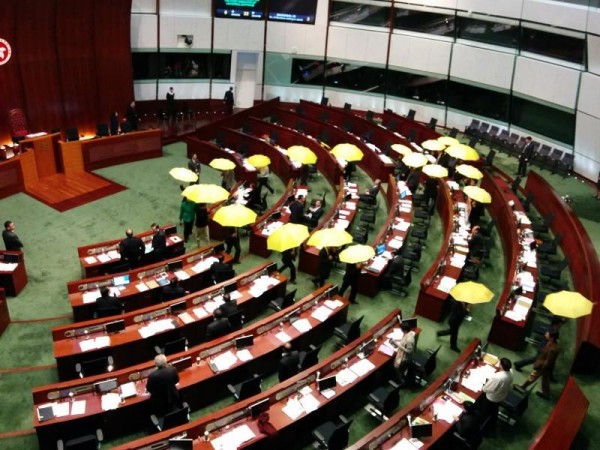
Video:
https://www.youtube.com/watch?v=NgBpCMpD5Cw
The pan-democrats have completely vanished
from view at this time. Nobody has shown up to share their thoughts on what went wrong or
what is to be done. Nobody has promised to show up at any commemorative
ceremony. It is as if they don't know those Occupy Central people.
Why?
As Alex Chow noted, everyone has his
political calculations. In the case of politicians, it is first and foremost
about elections. If you don't have an elected seat, you are nobody. If you
have an elected seat, power and money flows from it.
In the past, the rule-of-thumb is that the
electorate is divided into 60% pro-democracy and 40% pro-establishment.
Occupy Central has pushed 20% of the moderate pro-democracy camp over to the
pro-establishment side. Of the remaining 40%, 10% will go to the radical
parties and 30% to the traditional pan-democratic base. That means serious
trouble for the pan-democrats. They won't be able to win the 10% radical
voters by any means. For example, on November 29 2014, Fernando Cheung (Labour
Party), Helen Wong (Democratic Party) and Leung Yiu-chung (Neighbourhood and
Worker's Service Centre) went down to Occupy Mong Kok area and were roundly
boo'ed: "Who asked you to come down here?"
https://www.youtube.com/watch?v=lkYMS4-grnU ). So they must try to
win the moderates back by pretending that they had nothing to do with Occupy
Central.
But the Internet has memories: Photo of
pan-democrats with "Unite to support Occupy Central"
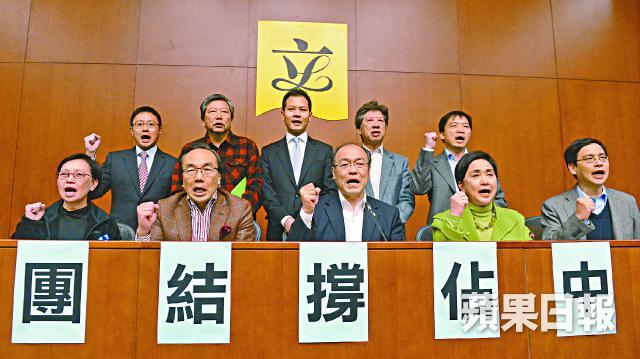
- When people are leaders of a mass
movement, they are supposed to have empathy with what the masses are
feeling. What do the masses think about Occupy Central? Look at Mong Kok
first:
(Oriental
Daily) November 1, 2014.
In Mong Kok, the New Town Mall and
Mong Kok Centre are right next to the occupied area. Normally, they are filled
with people, but now the shop owners are losing their shirts ... Yesterday our reporter went to the two shopping malls in the evening.
Normally, Friday evening is the golden rush hour. On this evening, there were
about 6 potential customers on the third floor of New Town Mall and twenty
people on the whole floor in Mong Kok Centre. Miss Lau who runs a fashion
store on the third floor of New Town said that her business fell by 90%s
in October. Miss Wong said that people see the chaos outside the street
and won't come into the mall. Sometimes people come upstairs for safety
when street fights break out. ... The shop owner named Apple said that
October is supposed to be a busy month averaging three to four thousand
dollars in revenue a day, but now she only made several hundred dollars
a day.
The leaders of Occupy Central have not
uttered a word about the small businesses which suffered economic losses
during that time. Nothing whatsoever.
- To say something sympathetic to the small business operators would be to
admit that Occupy was flawed, and then the 10% radicals would say that you
are a traitor. But actually shutting up would mean losing a lot more votes.
- I was talking to a female friend and I
asked her about how Occupy Central affected her (if at all). She began to
curse: "I live in Ma On Shan, and I take the bus every morning to go to work
in Admiralty. Because they occupied Causeway Bay, the bus had to make a
detour. Because they occupied Admiralty, the bus stopped somewhere in
Wanchai, except the location of the terminal stop was different almost every
day. It was total chaos because nobody knew what was going on. After I got
off wherever the bus let me off, I had to walk to the office. I have
arthritic knees, and all that walking really hurts. My normal door-to-door
bus ride was about one hour. During Occupy Central, the trip took two
hours." None of the Occupy Central leaders have ever uttered a sincere
word of apology to people such as my friend. That is why she will never vote
for a pan-democrat again.
- To say that the sufferings of common folks need to be considered is the
talk of "leftist retards." According to the Valiant Warriors, the rest of
the Hong Kong population are just pigs to be led to the trough to feed
whatever whenever.
- Benny Tai said that rule-of-law has not
been impact, because street crime is by no means rampant. Who are these
people then?
Or this compilation of violent incidents
https://www.youtube.com/watch?v=yDbx6CMlrbc
- On November 19, 2014, this was where
public opinion stood:
(HKU
POP - PopCon Survey on Occupy Movement)
Q6. Should the Occupy movement
continue or stop? (If the respondents think it should continue, interviewer
reads out answers 1 to 3; if the answer is stop, read out answers 5 to 6; if
"don't know/hard to say", there is no need to prompt further. Only one answer
allowed.)
4.4%:Continue, with a larger scale
6.1%:Continue, with the scale unchanged
3.3%:Continue, with a smaller scale (such as reducing the number of occupied
areas)
42.0%: Stop, use other ways to fight for universal suffrage
8.9%: Stop, because the goals have been attained
28.3%:Stop, because occupying is wrong
7.0%: Don't know/hard to say
Summary:
13.8%: Continue
79.2%: Stop
Unfortunately, the students who were the
nominal leaders were incapable of stopping Occupy Central. Simply put, if
they said STOP, then the (4.4% + 6.1%) would be crying BETRAYAL! That 10.5%
would have gone on their own way to "valiantly resist with force." However,
if they just lumber on with Occupy Central, they would risk more people
getting sick and tired of a seemingly pointless task, because the central
government seems perfectly happy with how things were turning out. That is
what Alex Chow was talking about. In the end, the Federation of Students
called for an escalation to lay siege to Government Headquarters, a move
that they knew would fail but it gave them the reason to exit afterwards.
But the point is not to analyze the past.
The point is to realize that Occupy Central must not and should not be
repeated, because (1) it is unpopular and alienates more people as time goes
by; and (2) it has no discernible impact on the central government with
respect to the demands of the demonstrators. The first time was a tragedy
for Occupy Central; if there is a second time, it would be a farce.
- Lester Shum points to the organizational
problems as the underlying factor. He said that they were not democratic
enough and made decisions that were not always transparent to the followers.
Look, if they want to run a democracy and they put up to vote on: Should we
withdraw? If all 60% of the pan-democrats voted, it would be 50%
moderates/traditionalists for and 10% radicals against. But the 10% radicals
won't accept the outcome. They will simply continue to Occupy. There will be
no motivation for the government to negotiate with the students or the
Occupy Central Trio or the pan-democratic political parties again because
their decisions mean nothing to the radicals. And the radicals are the ones
who are chanting "Bring down the Communist Party!"
- Joseph Zen is alone to say that Occupy Central is a
success and not a failure. He reasoned that because the movement made the
government lose its mind and used tear gas against the demonstrators, it was
successful in showing the true nature of this government. Fine, a logical
extension would be: If the movement escalated and made the government use
live rounds and kill 200 students, it would be even more successful. And it
is never too late, because the students can always go and toss petrol bombs
at the China Liaison Office this very minute!
- In the HKFP interview, Alex Chow is once again
chanting his mantra of district politics. He has totally forgotten how
it went when they tried it:
Reaching Out To Local Communities - Part 1
Reaching Out To Local
Communities - Part 2
Reaching Out To Local
Communities - Part 3
Reaching Out To Local
Communities - Part 4
Here is my advice to Alex Chow: Get lost! Go overseas to
study Buddhism, as you promised! This is sincere advice because your face is
recognizable as one of those responsible for the debacle known as Occupy
Central/Umbrella Revolution. You were a failure in all aspects, including
goal definitions, strategizing, organizing, building coalitions,
negotiations, leadership, etc. If you get involved in a local community project, you
will be a negative asset and you will torpedo that project upon
announcement. Let us have some fresh face without your type of baggage, okay?
(Wen
Wei Po) September 23, 2015.

To use unlawful methods? Or to use violent
methods? Which way makes more sense? Yesterday, the Baptist University
Student Union held a Civil Disobedience vs. Using Force To Stop Tyranny
forum. They invited Hong Kong Indigenous' Ray Wong and former Hong Kong
Federation of Students deputy secretary-general Lester Shum to attend. The
audience numbered less than one hundred, with many of them being middle-aged
folks. Although both speakers are regarded as opposed to the government and
responsible for disturbing social order and peace, they attacked each other
over the effectiveness of their respective methods.
Ray Wong began by promoting the idea of
violence. He advocated that the Hong Kong citizens must start an "armed
revolution." He said that force is only exercised in reaction to the police
force.
Therefore it is pure "resistance." He said that "the highest noble force" is
intended only to make the other side "yield" and thus "put a stop to the
conflict." Even if it is unable to stop the police, it will at least raise
the cost for law enforcement.
Ray Wong explained how "armed revolution" will
be carried out. He said that the Hong Kong police force has about 30,000
personnel.
When Occupy Central first began, the number of demonstrators is several
times that of the police. They absolutely had the numbers. However, the
number of people showing up today to resist is a lot less. Therefore each
resister will have to amplify their power many times in order to overwhelm
the police. He said that there was no need to respect the legal system in
Hong Kong. "Only by carrying out armed revolution can the government be
changed."
Meanwhile
Lester Shum said that "he is not opposed to violence in principle." But he
repeatedly raised doubts about the support level for Ray Wong and his ideas.
Wong rebutted that "civil disobedience" is just lying down on the ground
waiting to be carried away, and has delivered no results.
Videos:
SocREC
https://www.youtube.com/watch?v=Ra9YAKDAbV8 Part 1
SocREC
https://www.youtube.com/watch?v=PZNXqc3f7Iw Part 2
Internet comments:
- Let me ask one more time: Who
is happiest when fellow pro-democracy activists go at each other's throat?
Answer: The Chinese Communist Party, of course.
- And that is why you need to keep donating money to the Hong Kong Alliance to
Support Patriotic Democratic Movements in China. Even though they haven't
achieved a thing for 26 years, you can't criticize them because that would
make the Chinese Communists very happy.
- Ray Wong wants to increase the cost of law
enforcement. Fuck! The Hong Kong Police is paid for by Hong Kong taxpayers.
If the Police have to spend an extra $500 million for overtime pay, we are the
ones who have to pay for it. [Note: Ray Wong is jobless and pays no taxes,
so he doesn't mind.]
-
Currently Ray Wong's "armed revolution" actions are carried out by just a
few dozen people. So he says that each revolutionary must amplify his power
by many times in order to reach the same level as the 30,000 police
officers. I know of a certain serum (Super Soldier Serum) that will do just
that:
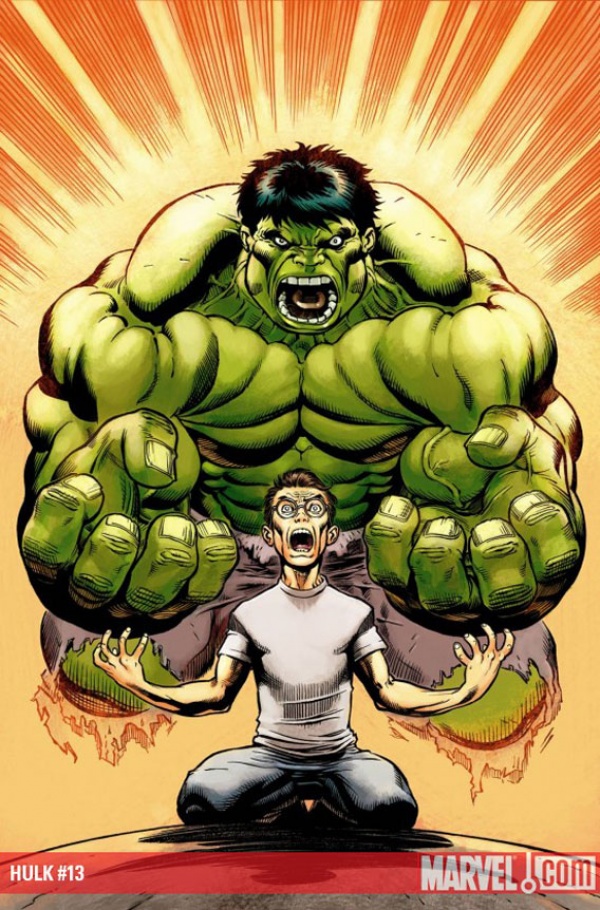
- Ray Wong was criticized for split
personality. On one hand, he insists that he and his group Hong Kong
Indigenous have been at the frontline of all major battles and therefore
experienced to lead. On the other hand, he will apologize for having made
many mistakes due to inexperience, because experience has to be acquired through
practice. What is for certain is that he and Hong Kong Indigenous have no
experience in "armed revolution" or "armed insurrection". If an armed
revolution were to happen today and he finds himself in the frontline (as he
insists he always will be), he wouldn't have a clue about what to do. You
must be a fool to follow Ray Wong.
- Ray Wong got the analysis wrong in many
ways.
Ray Wong thinks that the enemy
is the Hong Kong Police force which numbers 30,000 and then he plays a numbers
game. On the first day of the Umbrella Revolution, 120,000 were reported
to be present in Admiralty. He thinks 120,000 will be enough to overwhelm
30,000, because it is 4-against-1 combat. This may be true if you are playing
tug-of-war.
Quantitatively, if you name your time and place, the Hong Kong Police cannot
field 30,000 persons. The Police have to work in shifts, so some people
patrol during the day and others during the night. The Police have set
duties that must be covered (e.g. maintaining security at the airport). That
was why during the days when clearance was near, the Police were reported to
have 7,000 officers on standby and they worked 14 hours per day. So you have
to worry about fewer police officers than Ray Wong thinks.
Qualitatively, the issue isn't about fielding
120,000 warriors against 3,500 police officers. You can go back to
the siege of Government
Headquarters:
Eventually, the demonstrators swarmed
the entire roadway in front of the Chief Executive's Office. At that point, the police line was
backed up with the police cars parked right behind them. They had nowhere to retreat
now. Or so it seemed. It was at that moment (circa 1:30am) that a Blue Team
(Special Tactical Squad STS) of about 100 police officers was unleashed in a
flying wedge that drove through the demonstrators' front line and scattered
them. From then on, it was just a chaotic retreat. (see TVB News
https://www.youtube.com/watch?v=L7j9hoiPPKA ).
At 7am, about 100 or so Blue Team
members suddenly hurdled the metal barricades strung together by the
demonstrators and advanced towards the
slowly retreating crowd. Meanwhile, it could be seen from the corner of
the eye that another 100 or so Blue Team members sprinted down the left side
into Tamar Park and then swung right to come out on the right side of the
demonstrators. This caused the demonstrators to retreat quickly in disarray. The
police did not make many arrests which they could have. They wanted the
demonstrators to move on. Since there was daylight by now, the police could see
where the demonstrators were. The police herded the demonstrators down to the
main Admiralty camp. (see INT News Channel
https://www.youtube.com/watch?v=nTmjsnBHmL4 ).
The spirit of the demonstrators was
broken after two defeats in one night. They did not return, and they probably
never will again. It should be clear that the Blue Team can clear any site
anytime. But they were previously held back for political reasons as the
government waited for public opinion to swing in their favor.
Has Ray Wong address the simpler issue
of how to deal with the 100 Special Tactical Team members (="Blue Smurfs")?
Show us how you can solve the "Blue Smurfs" and maybe people will come out
again. Right now people have no confidence in Ray Wong and Hong Kong Indigenous,
or any other tough-talking revolutionaries. If Ray Wong doesn't like Lester
Shum's type of "civil disobedience" (lie down on the ground and wait to be
carried away), then there isn't much to like about Ray Wong's "armed revolution"
either (50 people surround Mong Kok Police Station, chant slogans and toss garbage cans/recycling
bins
onto Prince Edward Road West to block vehicular traffic).
Also Ray Wong does not address the
level of force that the Hong Kong Police is employing. Basically, the tenet is
that the police will use a level of force appropriate to the situation such that
they continue to maintain control. So if the revolutionaries are unarmed and
take actions such as chanting slogans, rattling metal barricades but not
physically attacking police officers, the police will respond with batons and
pepper spray (see
https://www.youtube.com/watch?v=dfUTqQmF_vU ). But if the
revolutionaries escalate, the police will also escalate to maintain control. If
the revolutionaries use batons, the police may fire rubber bullets. If the
revolutionaries use butcher knives, sharpened steel pipes, baseball bats and
spears to cause injuries, the police may fire Remington shotgun shells. If the
revolutionaries toss petrol bombs, the police may fire live rounds or even use
hidden snipers. Ray Wong has no experience in dealing with the consequences of
escalation. The police are probably hoping that he would escalate.
Hong Kong police officers are armed
with pistols. In the well-known Lung Wo Road incident in which three police
officers were surrounded by dozens of demonstrators and photojournalists for
many minutes, the police only used their batons. Had the unarmed revolutionaries
escalated at that moment (e.g. use rods to hit the police), the policemen might
have pulled out their pistols in self-defense.
The Hong Kong Police made a mistake
in firing the 87 teargas canisters on September 28. Anywhere else in the world
this is just international standard and no one would give a blink (see, for
example, the
Hungarian
police using tear gas against Syrian refugees (including women and
children) recently)). Only in Hong Kong do some people think that this is the
end of human civilization. The Hong Kong Police made the mistake because they
did the same in 1966 and it was okay then (see SCMP archive photo):
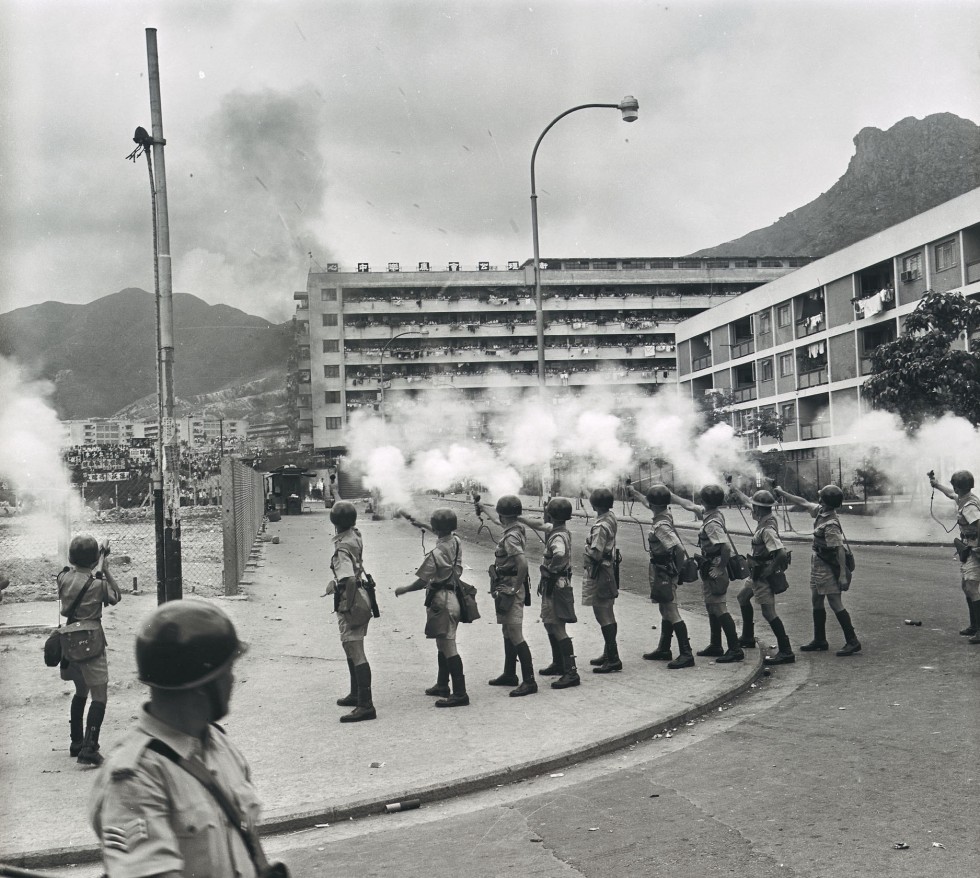
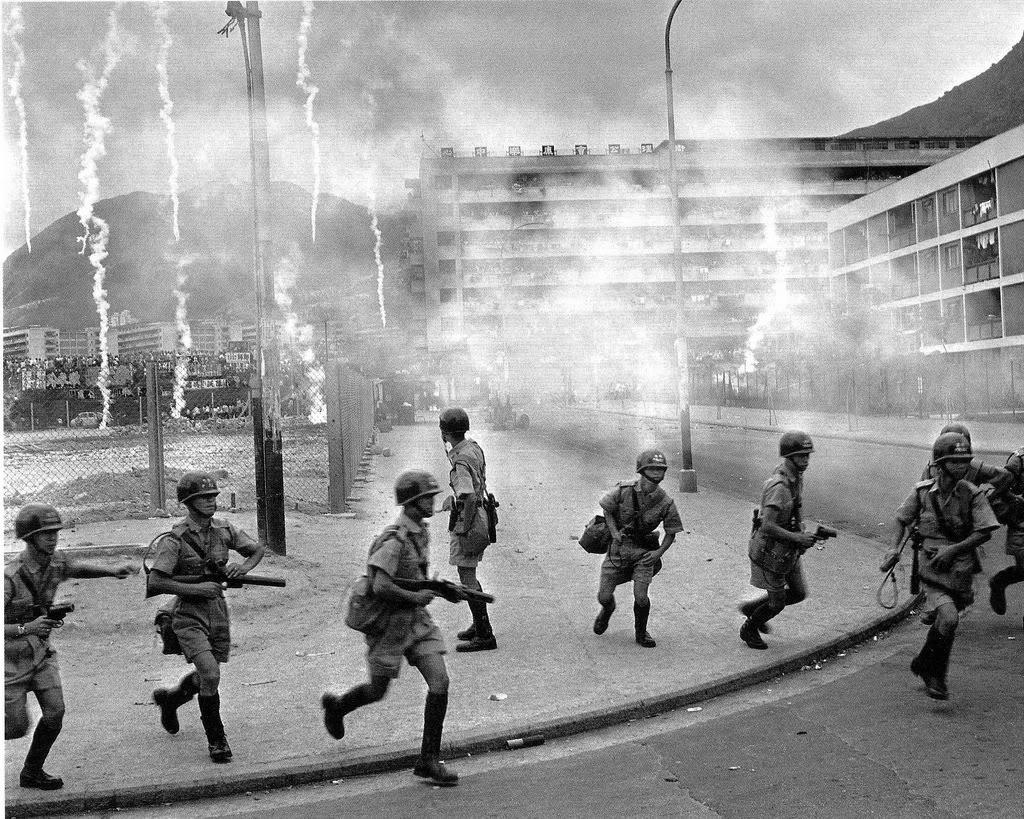
- That's a lot of verbiage. But a
revolution is not inviting guests to dinner. If Ray Wong wants an armed
revolution, he and his lackeys can just pick up machetes, sharpened steel pipes,
axes and spears, then charge into the police station and kill everybody inside,
then declare the establishment of the Republic of Hong Kong. Let's get it over
with once and for all, one way or the other (most likely the other) instead of
puttering around with theoretical debates about armed uprisings.
- Well, Ray Wong stated clearly that his idea of "armed revolution" is to use
violence to intimidate the enemy to surrender and thus to put an end to the
conflict, not to kill them all.
- Ah, I totally get it. In other words, you are saying that Ray Wong is a
pussy.
- If the Hong Kong Police should melt
away in defeat,
Article 18 of the Basic Law kicks in:
Article 18
The laws in force in the Hong Kong Special
Administrative Region shall be this Law, the laws previously in force in
Hong Kong as provided for in Article 8 of this Law, and the laws enacted
by the legislature of the Region.
National laws shall not be applied in the Hong Kong
Special Administrative Region except for those listed in Annex III to this
Law. The laws listed therein shall be applied locally by way of
promulgation or legislation by the Region.
The Standing Committee of the National People's Congress
may add to or delete from the list of laws in Annex III after consulting
its Committee for the Basic Law of the Hong Kong Special Administrative
Region and the government of the Region. Laws listed in Annex III to this
Law shall be confined to those relating to defence and foreign affairs as
well as other matters outside the limits of the autonomy of the Region as
specified by this Law.
In the event that the Standing Committee of the
National People's Congress decides to declare a state of war or, by reason
of turmoil within the Hong Kong Special Administrative Region which
endangers national unity or security and is beyond the control of the
government of the Region, decides that the Region is in a state of
emergency, the Central People's Government may issue an order applying the
relevant national laws in the Region.
That means the Central Government can declare martial law,
send in the People's Liberation Army and impose a curfew indefinitely. Those
found on the streets during curfew hours will be shot on sight. Ray Wong
would be shot or arrested unless he gets asylum at a foreign consulate.
- If the Chinese Communists really want to sent the PLA in
and replace One Country Two Systems/Basic Law with martial law, they
couldn't get a better enabler than Ray Wong. With enemies like these, who
needs friends?
- You worry too much. Occupy Central Trio member Chan Kin-man has assured us
that the Chinese Communists will collapse on their own really really soon. So Hong Kong
needn't worry about any PLA, martial law or whatever. The revolution will be
handed over on a platter.
- Ah, yes, everybody is sitting on their hands waiting for
the mythical 支爆
(The China Meltdown). Nobody knows when it will happen, but everybody knows
that it will happen. In the interim, what can you do? Donate more money more
frequently to Ray Wong's Hong Kong Indigenous to prepare for that day!
- If Ray Wong's "armed revolution" fails and the PLA
marches in, he'll just shrug his shoulders and say, "It was worth a try. At
least we've got a civic awakening of the young people. It is certainly
better than sitting around and doing nothing."
(Oriental
Daily,
Oriental Daily) September 21, 2015.
Ever since the police cleared
the Occupy Mong Kok area last November, Shopping Revolutionary (Gau Wu) members have
gathered almost nightly on Sai Yeung Choi Street South to yell and quarrel
with shopkeepers and passersby.
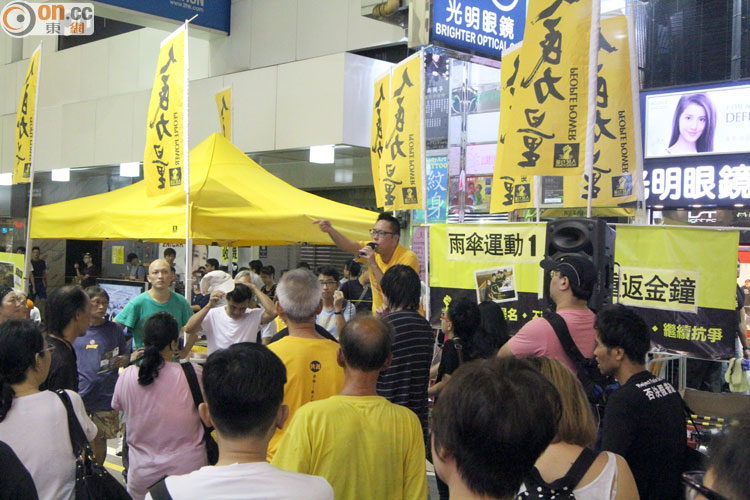
On the day before yesterday, the Shopping
Revolutionaries announced beforehand that they would celebrate the first 300
days of the Shopping Revolution last night at 8pm on Sai Yeung Choi Street
South.
The event was
preceded by a forum organized by People Power featuring Tam Tak-chi. At
around 745pm, a 51-year-old woman who was taking mobile phone photos of
People Power's Tam Tak-chi giving a speech claimed to be punched by a
56-year-old man such that her mobile telephone hit the corner of her eye and
caused an injury.
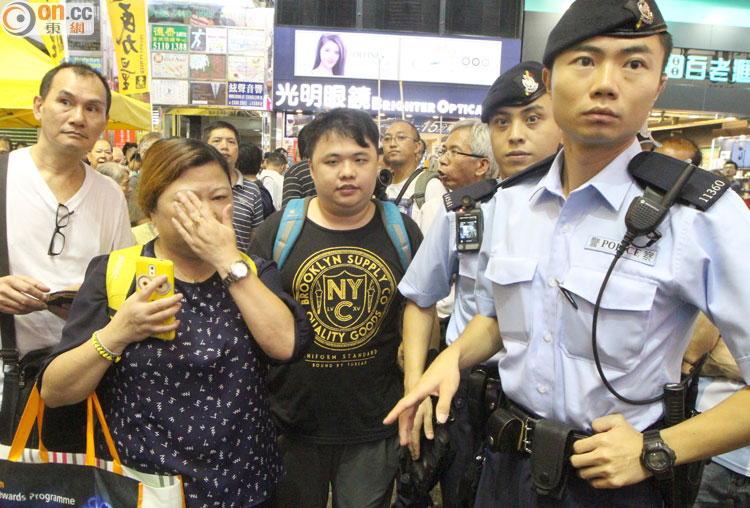
The man was surrounded by a large number of
Yellow Ribbons. The police came and took the man onto a police van. The
injured woman was taken to the hospital by ambulance.
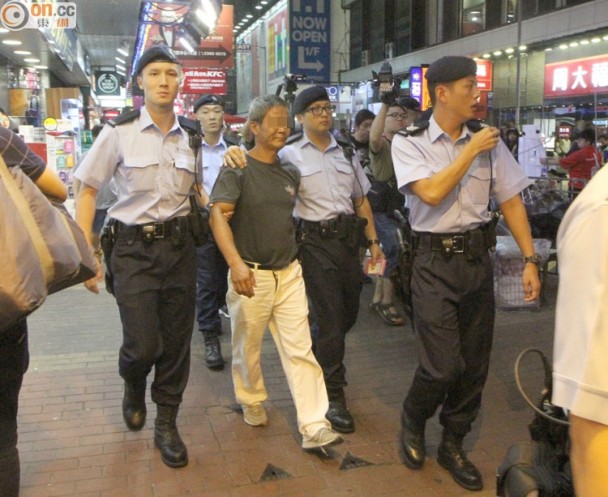
Meanwhile, Andy "Captain America" was waving
his British colonial dragon-lion flag for Hong Kong independence.
When the People Power forum ended, it was the
turn for the Shopping Revolutionaries. They brought in a large "I want
genuine universal suffrage" banner and they posted posters making fun of
government officials.
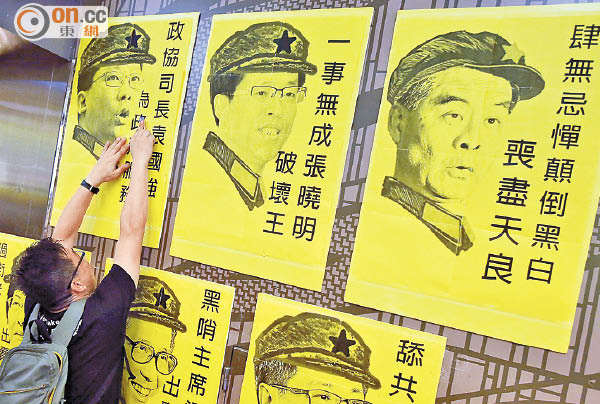
At around 10pm, the one hundred or so Shopping
Revolutionaries raised their umbrellas and punched some yellow balloons.
Then they began to march from Sai Yeung Choi Street South to Nathan Road,
led by a woman who said that she accepts neither China nor its people and
who held a Republic of China flag. They were shadowed by a large number of
police who wanted to make sure that these marchers do not charge onto the
roadway to block vehicular traffic. During this period, there were clashes between the
Shopping Revolutionaries and dissidents. The police took away four persons,
including Ronald Leung Kam-shing (North District Parallel Imports Concern
Group), the under-aged "Chalk Girl" who was once arrested for drawing graffiti
outside Government Headquarters and two other men. The four were identified
by a man who claimed to have been injured by them. The rest of the
demonstrators then proceeded to surround the Mong Kok Police Station to
demonstrate
The Shopping Revolutionaries announced that on
September 26, they will march from Mong Kok to Tsim Sha Tsui, take the ferry
across the harbor and return to Admiralty. In addition, on September 28,
which is exactly one year after the police fired tear gas, they will be in
Admiralty to watch the moon and eat moon cakes.
(Apple
Daily) September 21, 2015.
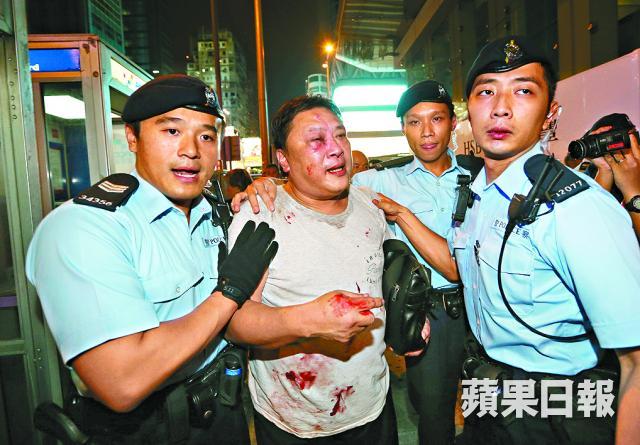
About 50 persons gathered as usual on Sai
Yeung Choi Street South last night. They said that they will continue to do
so until they get genuine universal suffrage. At around 11pm, an obese man
wearing a white t-shirt claimed to have been assaulted by Shopping
Revolution regular Leung Kam-shing. The man was bleeding in the head. But
Leung told our reporter that he never touched the man. Leung was taken onto
a police van. According to information, another man and a woman ("Chalk
Girl") were also take away. The Shopping Revolutionaries then called for
everybody to go down to the Mong Kok Police Station to show support.
(Wen
Wei Po) September 21, 2015.
About 20 Shopping
Revolutionaries held a street forum. They raised banners for "I want genuine
universal suffrage" and "Persist to the very end", and they held yellow
umbrellas. The members took turn to tell everybody about how they feel over
the past year. There were many civilian spectators and police observers.
Loyalty Alliance member Ah Man was present as
an observer. The Shopping Revolutionaries tried to provoke him, but Ah Man
held his arms akimbo and declined to react.
The forum ended after 10pm. The demonstrators
proceeded from Sai Yeung Choi Street South and walked up Portland Street in
order to demonstrate at the Mong Kok Police Station. Suddenly somebody
shouted "Assault!" A man wearing a white t-shirt claimed to have been
assaulted by three of the demonstrators. The demonstrators were in an uproar
on Argyle Street. The police removed three demonstrators and the man in the
white t-shirt to investigate.
When the demonstrators arrived at the Mong Kok
Police Station, they conducted a countdown to commemorate the 87 tear gas
canisters. But that led to an internal squabble because the Localsits
objected to any celebration of the anniversary of Occupy Central. The
Localists and the Shopping Revolutionaries exchanged a lot of obscenities.
(Oriental
Daily with video) September 21, 2015.
At 450am, the three men and one
woman were released. The four were arrested for "assault causing actual bodily
harm." The 15-year-old girl was also charged with criminal destruction of
property. In addition, the 59-year-old man was found with Part 1 Poison on his
person and he will also be charged with possession of Part 1 Poison (note:
Part 1 Poison are typically prescription drugs that that must have a
prescription signed by a doctor and then sold by a licensed pharmacy. The
reason is that the drugs may be dangerous to certain persons in certain
conditions (e.g. pregnant women). An example is
codeine
which is sometimes used as a recreational drug.)
Videos:
SocREC
https://www.youtube.com/watch?v=MOwxNQ7nNyM More photographers than either
police or demonstrators. Followed by march to Mong Kok Police Station.
SocREC
https://www.youtube.com/watch?v=isKHwsI52ZI Buffet meal for the
participants. Countdown from 87 and down. Singsong.
Internet comments:
- They are running a human flesh
search on this guy:
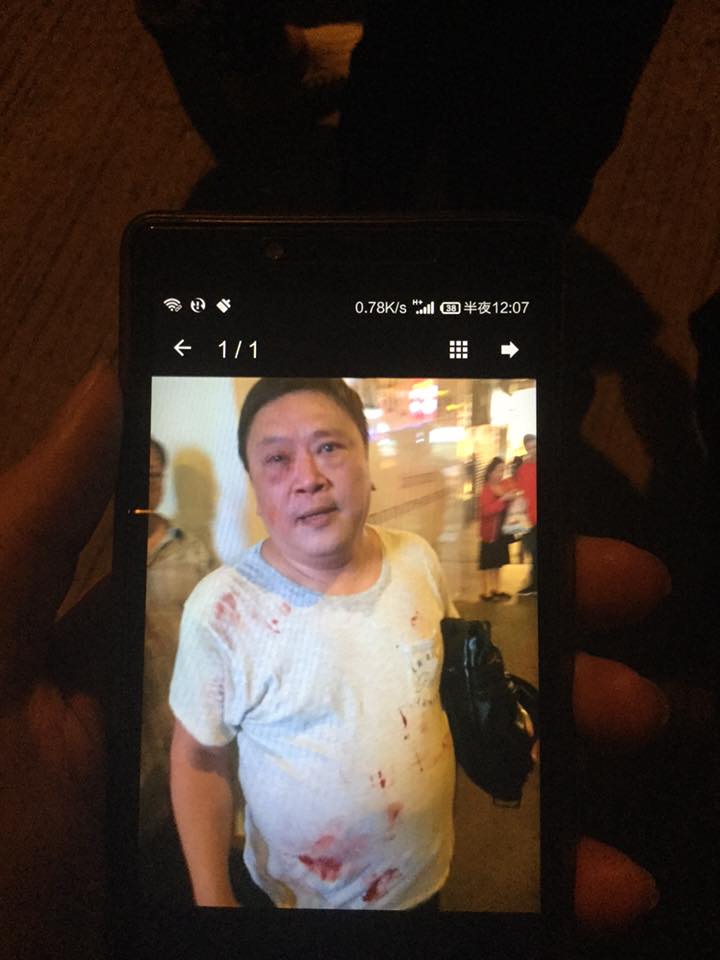
They believe that he may be a Blue Ribbon who previously participated in the
assault on Yellow Ribbons.
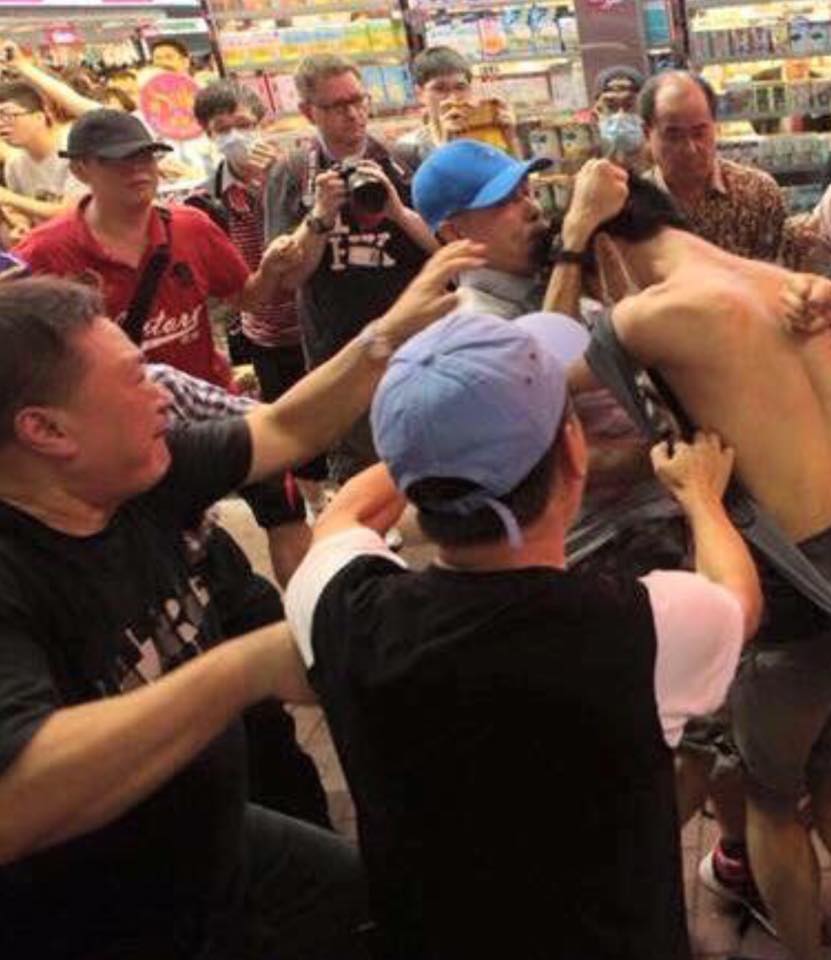
But that is not germane to the present case.
- The Yellow Ribbons characterize themselves
as being young and having better education and higher income. But take a
look at this photo of the Shopping Revolutionaries outside the Mong Kok
Police Station. They look like a bunch of regular uncles and aunties?
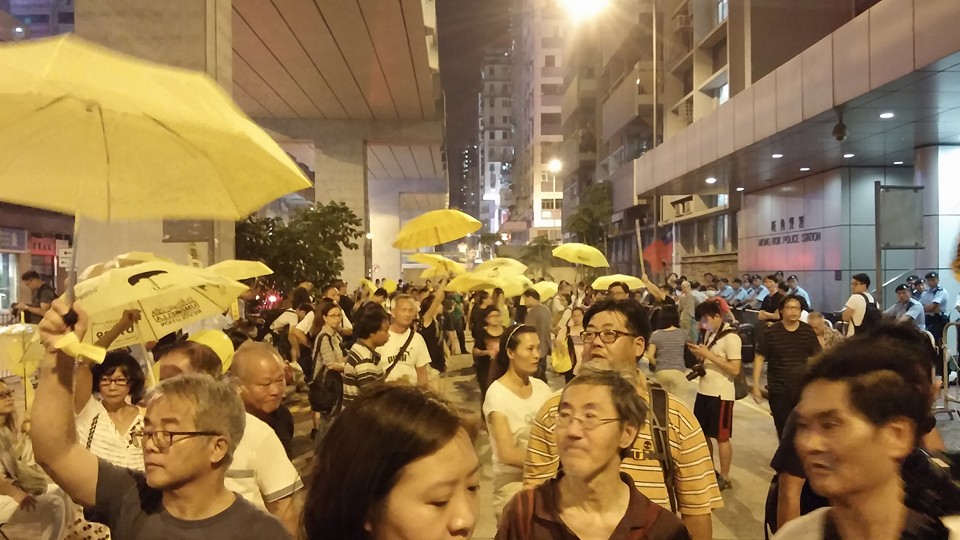
- (Coconuts
Hong Kong) January 19, 2015.
A 14-year-old girl who was arrested for
chalking flowers on Lennon Wall and faced being taken into care will be
allowed to stay with her family, a court ruled today.
City authorities had been seeking a "care
and protection" order for the teenager, who was sent to a children's home
after being caught scribbling on the wall at the Admiralty protest site in
last month. Although she was later allowed to return to her father on bail
and under curfew, the case sparked fears authorities are carrying out a
clampdown on protesters after the end of two months of rallies for free
leadership elections.
"After considering the facts and based on
suggestions made by social workers, there is no need to make such an order
now," Hong Kong magistrate Winnie Lau said today.
Prominent pro-democracy veteran Martin
Lee, who represented the girl, said the teenager "should be happy today."
The girl herself was not available for comment.
If the Chalk Girl was allowed to stay with
her family, there had to be certain "good behavior" conditions. To be out
there late at night in Mong Kok, "commit assault with actual injuries
inflicted" and "cause criminal destruction of property" is going to violate
those conditions. So this may not be the end of the story for the Chalk Girl.
P.S. The "criminal damage of property"
refers to the charge that she yanked at the strap on someone's backpack
until it broke. This is not like breaking the glass door at the Legislative
Council to cause $570,000 in repair costs.
- Noted from various Facebook
posts:
- At around 630pm, a man
assaulted a woman outside the Chung Shun Building on Sai Yeung Choi Street
South and caused an injury on her left eye. The attacker went inside a
McDonald's. He was detained by citizens and handed over to the police. The
woman was sent by ambulance to the hospital.
- The Shopping Revolutionaries
insisted the police to interrogate the man in their presence, but the police
took the man down to the police station to assist in their investigation. Why?
It was impossible to ask any questions when there are a dozen
obscenity-screaming people surrounding you. What were they saying? "Why
the fuck do you need to ask any fucking questions!?" "Put the handcuffs on
him, he is a criminal" "Eat shit, Evil Police!" "You are going to fucking
release him?"
The policeman said: "We are conducting a preliminary investigation. I never
said that I was going to release him. I never said that I was going to release
me. If you keep up with this, I am going to charge you with obstructing police
business."
- Here is an
added detail about the attack outside the Chung Sun Building. The man
and the woman may be acquainted with each other, so that the cause of
the attack is now uncertain.
- At around 900pm, the Blue
Ribbon guy known as "Magnifying Glass" showed up to watch the proceedings.
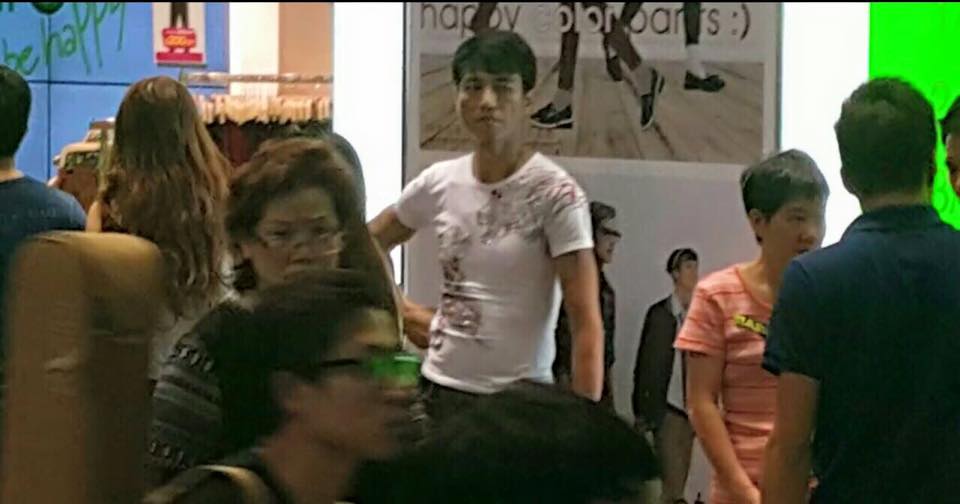
- At around 930pm, the Blue Ribbon guy known
as "Ah Man" showed up. The Shopping Revolutionaries greeted him and asked
him when he is going to jump off the roof. Ah Man smirked and did not
react. The police eventually escorted him to leave through the MTR subway.
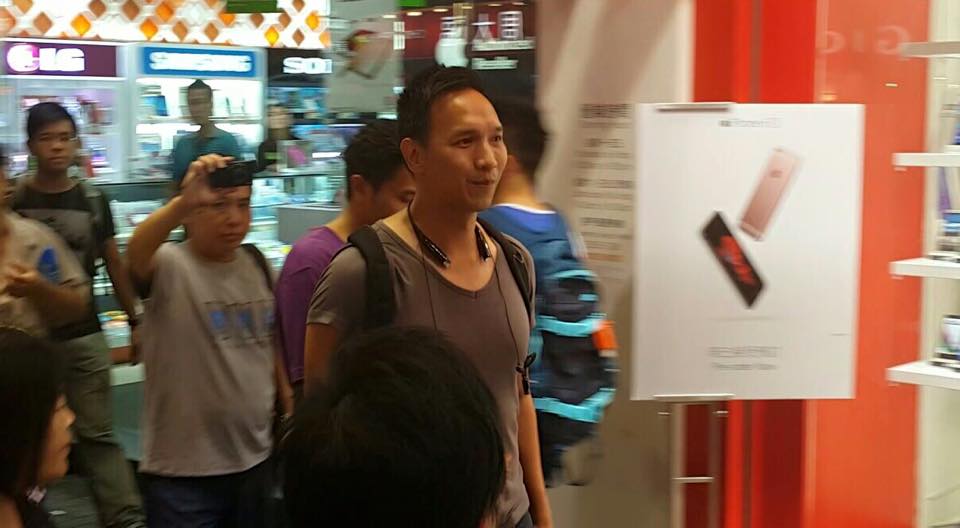
- At around 1000pm, a Shopping Revolutionary
took a video of the Blue Ribbon guy named "Magnifying Glass" congregating
with several other men. They appear to be getting paid by somebody for
their activities, although other interpretations are possible.
- At around 1030pm, the Blue Ribbon guy
nicknamed "Magnifying Glass" approached the Shopping Revolutionaries to
"resolve a previous misunderstanding." As the Shopping Revolutionaries
argued with him, a large group of Blue Ribbons charged up to attack the
demonstrators. Many police officers came and separated the two groups. One
of the Blue Ribbons wearing a white t-shirt said that he was assaulted by
the demonstrators. The police asked him to identify his attackers. A woman
directed him to make the identification. With the help of this woman, the
man identified Leung Kam-shing, the "Chalk Girl", Sam and Peter. The
police put the four onto a police van down to the police station to assist
in the investigation. Other Shopping Revolutionaries followed down to the
Mong Kok Police Station and demanded to know why those four Shopping
Revolutionaries were taken away whereas the Blue Ribbons who attacked the
Shopping Revolutionaries were not. The police said that there was no proof
that the four did not attack the man, that the man had identified these
four as the attackers, so they had to bring everybody down to the police
station to sort things out.
- At around 1155pm, one group of citizens
was getting ready to sing in order to celebrate the 300th day of the
Shopping Revolution.
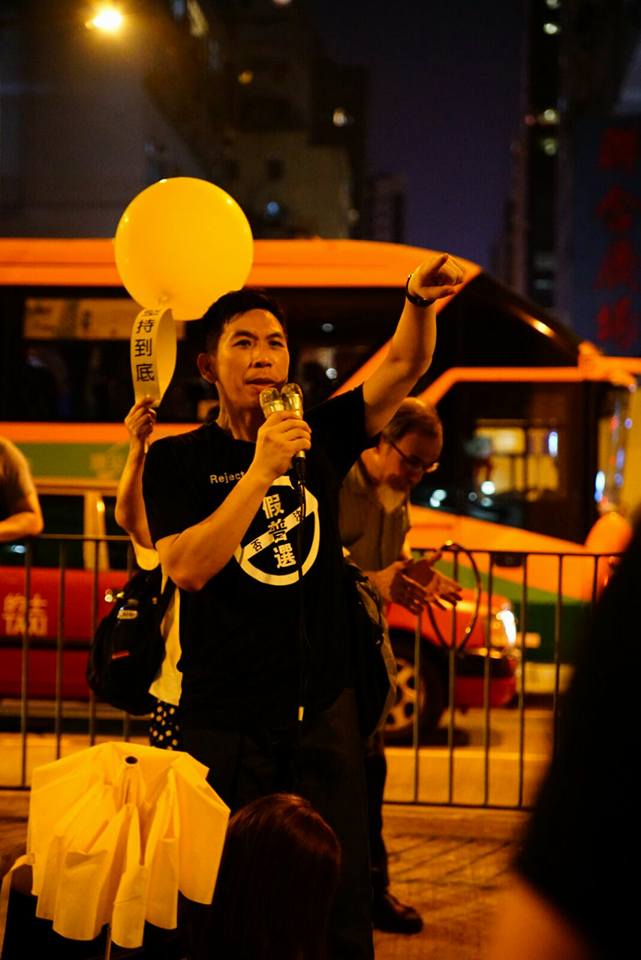
Other citizens objected because there is no reason to celebrate the arrest
of the four brave warriors tonight. Both sides exchanged opinions.
"Is it alright for us to commemorate the tear gas?"
"If you are afraid, you should eat shit! You are fucking useless!"
"Is it alright for us to commemorate the tear gas?"
"Alright, I'll stand here."
"Is it alright for us to commemorate the tear gas?"
"Do I have to ask your fucking permission to do what I want?"
"Is it necessary to be so overbearing?"
"Why do I have to fucking ask you? Who the fuck are you? You eat shit! You
Hot Dogs (=Civic Passion) eat shit! Why do I have to fucking ask you?"
Then Hong Kong Indigenous convener Ray Wong Toy-yeung led the citizens
present to chant: "We demand to get a reasonable explanation! We demand to
get a reasonable explanation!" and then finally "Down with the Communist
Party! Down with the Communist Party!"
- It is said that People Party
are the puppet masters behind the Shopping Revolutionaries on the Sai Yeung Choi
Street South pedestrian mall. Therefore, the events were organized tonight as
a People Power showcase for Tam Tak-chi in his quest for a Legislative/District
Council seat at 5pm, followed by the Shopping Revolutionary 300th day
ceremonies at 8pm. However, the script got broken when a Blue Ribbon was
assaulted afterwards. With four persons taken down to the police station, Hong
Kong Indigenous members showed up and took over the show. They seemed better
experienced in laying siege to the Police Station and obtaining legal help for
detainees.
- But where does the bit about "Down with the Communist Party!" come from?
There were about 70 persons present at the time, and this may be fine with
them. But if Hong Kong Indigenous should harbor ambitions for the
Legislative/District Council elections, then this is negative (and
unnecessarily so) baggage.
- At 0045am, a woman explained
what has happened so far. There are three men and one girl inside the police
station. The person who claimed to be assaulted by the four is undergoing a
medical examination at the hospital. Legal representatives have arrived and
are filing the relevant papers. She said that those who have to go to school
or work can leave first. However, some of those present cursed her out with
obscenities for telling people to disperse.
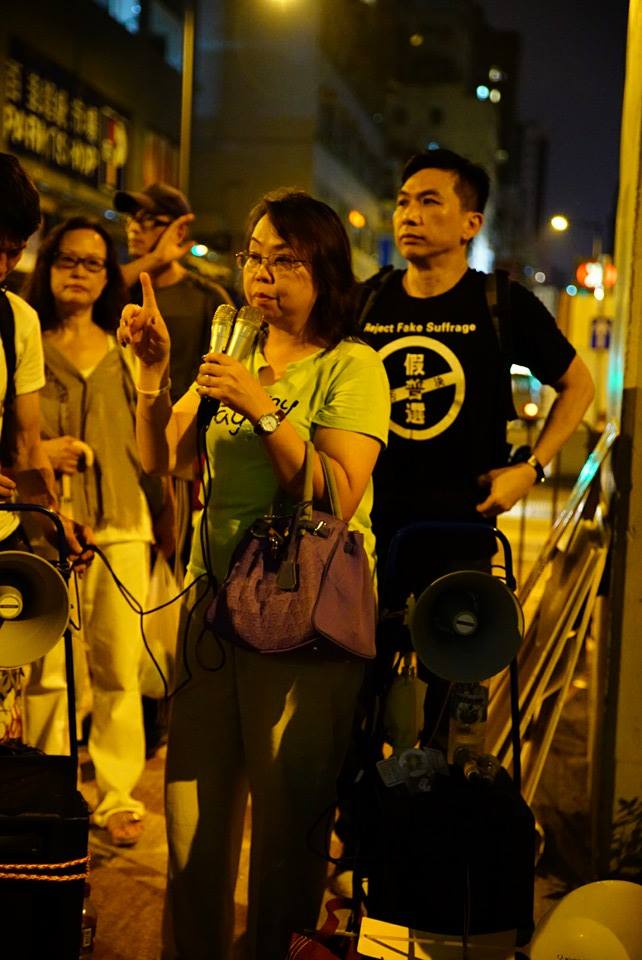
- At around 1am, one demonstrator had an
epileptic fit. The police went to offer assistance. The individual
recovered afterwards.
(Apple
Daily, with video) July 19, 2015.
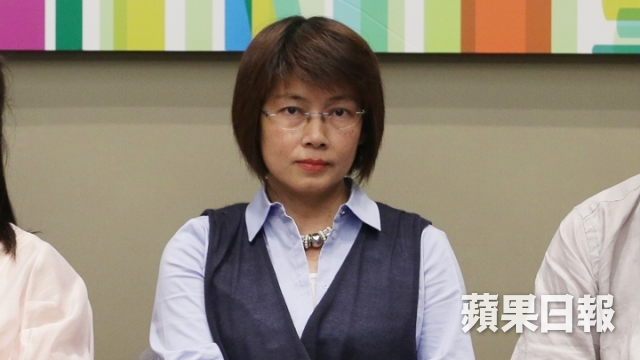
At the Hong Kong Bookfair, Yazhou Zhoukan
organized a forum titled: <Hong Kong: The Games Inside and Outside The
Umbrella> and invited writer Chris Wat Wing-yin and others to speak. Wat
said that the Occupy Movement "attracted many mental patients to come out."
Wat also said that people are basically bad but they become good because of
the law. "When you know that the police are standing on the side, you
wouldn't cross the street against the DON'T WALK sign; but if there are no police
around and you don't see any cars, you may think about crossing the street.
Such is the unspoken proclivity to break the law." She also thought that the Occupy Movement
opened up Pandora's Box so as to bring out all the hidden criminal intent
out into the open. She used herself as an example: "I tend to think that I
am a very normal person. During these 79 days of Occupy Central, I really
thought about parking wherever I wanted, because I thought that the police
would be too busy elsewhere to issue a parking ticket to me."
(Apple
Daily) September 19, 2015.
Recently the Internet user known
as Lau Ma Che had an encounter with Joshua Wong Chi-fung in the MTR (see
#323). Lau now says on
Facebook that he intends to ambush Joshua Wong again on Sunday at the
City Forum in Victoria Park. He said: "Joshua Wong, you fucking fool, I am
issuing an official declaration of war now."
Last evening Joshua Wong replied on Facebook:
"You took a photo of yourself carrying a Yellow Ribbon umbrella in Mong Kok,
now you go around and criticize the Occupy Movement for affecting grandpas
and grandmas. At the time when you made a video to criticize me, you were
actually in the Occupy Movement." Joshua Wong then quoted writer Chris Wat
Wing-yin: "The Occupy Movement attracted many mental patients to come out."
Joshua Wong said that Chris Wat "has seen through many things in the world."
Joshua Wong also said that he was not scheduled to attend the City Forum
anyway.
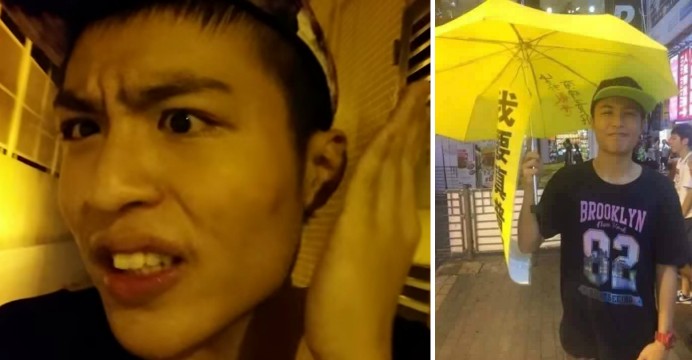
Who are the more famous "Mental
Cases of the Umbrella Revolution"? Below are some obvious candidates:

Andy ("Captain America) Yung Wai-yip (originally
posted at #016)
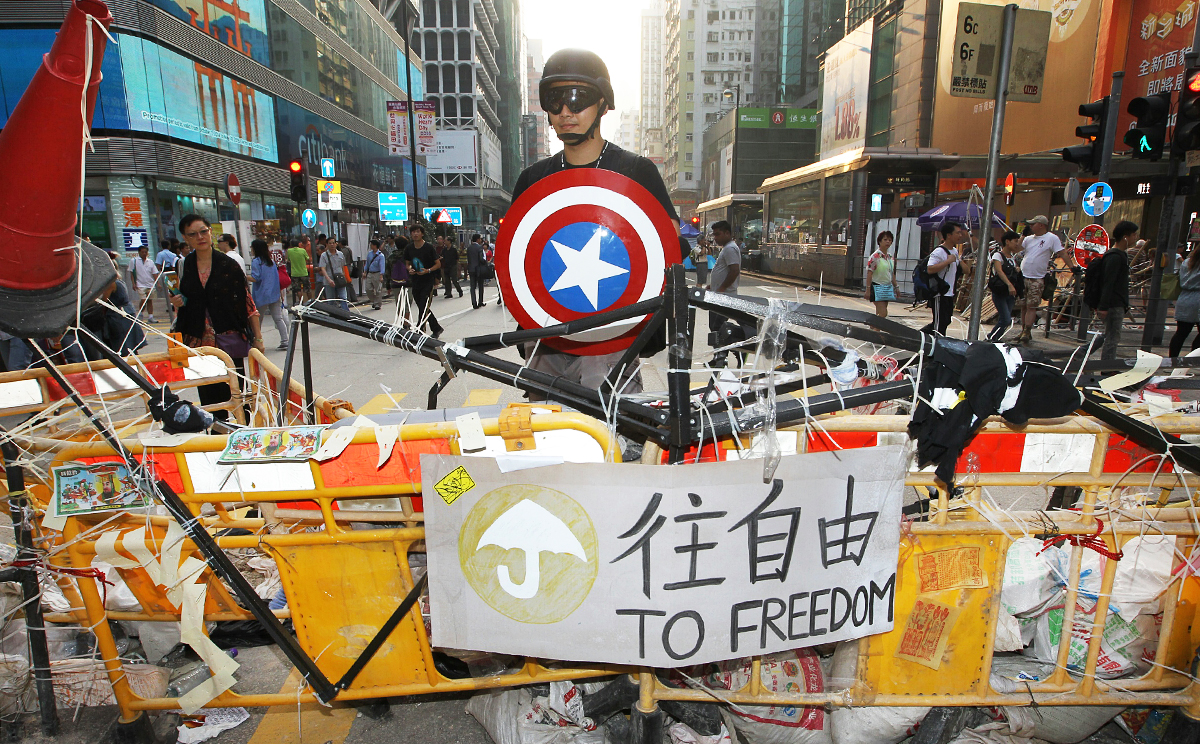
(YouTube
https://www.youtube.com/watch?v=750pjPpQHsM)
This is a compilation of videos showing the exploits of the character known as
Captain America in the occupied Mong Kok area.
0:00 In the beginning, Captain
America is posing for fans when a young woman with a faked shrill voice goes
after him in a very sarcastic manner.
0:10 Female: Thank you for promoting freedom in Hong Kong. Thanks a
lot. The Chinese government thanks you.
0:18 Female: Take off the helmet. Do not wear a helmet.
The second clip starts with CY Leung's
insinuation about foreign interference in the Umbrella movement, and then shows
Captain America manning the barricades. Then the same young woman
confronts Captain America once more.
1:05 Female: How is Raymond Wong doing now? How are the finances? No
money? I think you know him. Get some more Avengers. Get a few
more. You are just one. You can't do it alone.
1:34 Female: You use illegal methods to prevent others from legally doing what
they would like to do. That is wrong, Captain America! You should go
back to America to do these things. The American government will support
you. This is China here. America and China are different worlds.
1:55 Captain America: (inaudible, but seemingly in Cantonese)
1:58 Female: What are you saying? Why don't you say clearly what
your want?
2:00 Another male bystander: He is speaking in English. You don't
understand. You need an interpreter.
2:04 Female: It isn't English. It's English. Damn.
2:18 Female: What is best about Hong Kong? The best thing about Hong Kong
is the rule of law. It is fully developed/perfected. What you are
doing is destroying the rule of law.
2:37 Female: You explain. You explain to the camera. I will post it
on the Internet. Speak quickly. I have just taken a lot of film.
I am out of memory space. I am going to give you five seconds.
Start. I am giving you five seconds to prepare.
2:40 Captain America: (inaudible)
3:05 Female: The thing I asked you to explain previously. You didn't
explain it.
The third video is taken at the
demonstrators' main tent.
3:26 Female: Do not go to work. Do not go to school. Dissolve
the Legislative Council. You are hiding your face. This is known as
wanting to show off your bravery but nevertheless wearing a helmet for reasons
of personal safety.
Captain America walks away.
The fourth video is taken afar while
Captain America has his helmet off. Thus, he is identified.
Now that the face of Captain America
has been revealed, another video was found with apparently the same man waving a
British flag.
4:34 Unseen male voice: Fuck your mother, you dog slave! You go back to
England. You go back to England and eat shit! Dog slave! Fuck
you, that's right! Fuck your mother! Fuck you!
4:59 A little old lady comes up to struggle with the demonstrator. He
pushes her away, and a mob of people rushes up. A man says, "He hit the
grandma!"
The sixth video was taken on October 24
by television station TVB.
5:50 It showed some people trying to dismantle the barricades that were
erected by the demonstrators. Captain America slammed an old man with his
signature shield. The old man fell to the ground in shock. Captain
America was arrested by the police and escorted away with a full phalanx of 30
police officers through a riotous mob of photojournalists, each wanting to take
their potential prize-winning photograph. It is odd that he was led away
with the shield still in hand. Isn't that supposed to be a deadly assault
weapon (just go and watch the Captain America movie trailers on YouTube)?
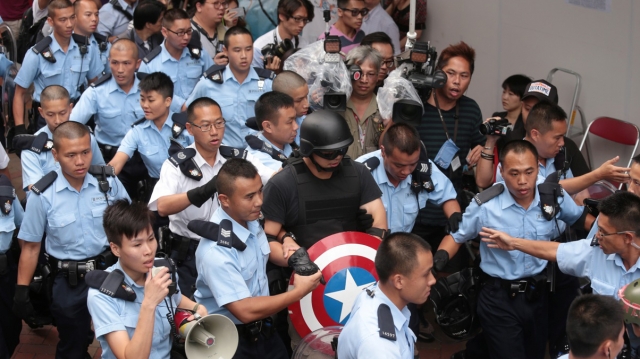 (newspaper photo)
(newspaper photo)
7:09 (caption) Apple Daily showed how Captain America was taken away
by 30 police officers, but they did not show how he shoved the old man to the
ground with his shield. Thus, Apple Daily continues to conceal all the
unpleasant dark aspects of Occupy Central and prettify the violence. TVB's
news channel showed the relevant parts of the video, but TVB did not show the
part about how the old man got up and continued to dismantle the barricades.
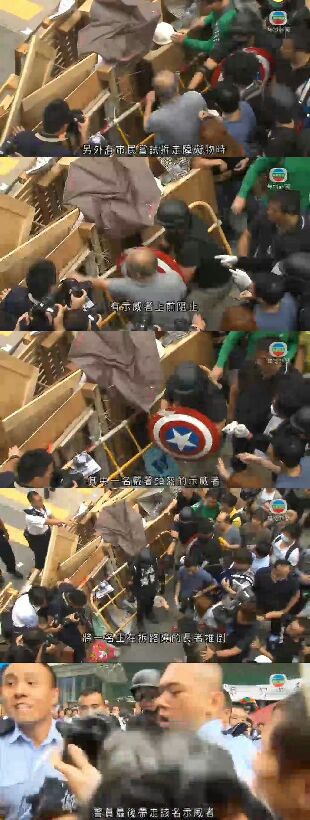
This story will not end here.
Captain America will post bail and be back to occupy Mong Kok very soon. We
will be seeing how Captain America continues to spread America's message in
Mong Kok ...
Addendum:
https://www.youtube.com/watch?v=YKWJMeOHZrY Interview with digital radio
station dbc:
0:01 (Interviewer) I see that your
shield is completely chipped.
0:04 (Andy) The shield has undergone some clashes
0:05 (Interviewer) Why did you choose this shield as a tool?|
0:10 (Andy) Eh ... actually ... we ... this shield. Eh. I did not choose the
style. Besides ... I thought that it looked good. In addition, the shield ...
when I went to the store to make a purchase, they did not have any other shield.
This was the only shield.
0:26 (Interviewer) Are you worried that you would be accused of being a foreign
power because you are holding the Captain America shield?
0:28 (Andy) Eh ... I am not afraid. I obtained this shield as a defensive tool.
It is not meant to deliberately show myself off.
...
0:46 (Andy) I fuck your mother!
0:46 (Policeman) I have issued an warning to you. Okay? I hope that you follow
the arrangement by the police. You are charging the police defensive line.
0:51 (Andy) I didn't.
0:52 (Policeman) You did.
0:54 (Andy) Okay.
0:54 (Policeman) We'll bring you to a safe place so that you can leave.
0:55 (Andy) Okay.
0:58 (Policeman) So this is what you are going to do.
...
1:02 (Andy) Then he took me aside. He issued a verbal warning to me. He said
that I charged at the police defensive line by the HSBC Bank. Eh ... then he
mentioned the unlawful assembly ... eh ... Actually, everybody is in the
unlawful assembly. He told me not to show up at scene again. "You leave." That's it. I
thought that it went through the left ear and exited through the right ear.
The Movement continues ...
Addendum: Cable TV has a special
segment that includes Captain America (YouTube
https://www.youtube.com/watch?v=YXryhmJcRcA). At 2:14, the interviewer
quizzes Captain America on his understanding of issues related to the election
process.
0:24 (VO) After the police took away his Captain America uniform and
shield, Andy says that he has only these equipment left.
0:27 (Andy) The helmet must be worn. It is very important to protect the
head.
0:33 (VO) He usually works as a lifeguard. He is currently out on
bail, and is waiting for the investigation to end on suspicion of having
committed physical assault. He is continuing to spend full-time on the
Occupy movement.
0:38 (Andy's grandmother) Don't put that thing on. That ribbon.
0:43 (Andy) This movement has been open and transparent from start to end.
What is there to be afraid of being filmed?
0:46 (Andy's grandmother) Of course, I don't want him to go out. It
is outright dangerous. Then you have to go to prison. You are being
prosecuted. How are you going to get a job when you get out? I think
he basically does not know what he doing. Maybe he was persuaded.
Maybe he got to know some friends. This is a chance to become famous.
You have enough fun. I feel very helpless. Obviously I feel
extremely bad.
1:57 (Andy) How are you? How are you?
2:00 (woman) You look handsome.
2:02 (Andy) Thank you, thank you. It is not about being famous. It
is genuinely about giving my effort to this movement. To fight for Hong
Kong civil rights.
2:14 (interviewer) What are the three barriers set up by the National
People's Congress?
2:16 (Andy) The three barriers? I don't know how to describe the
details. But ... I actually ... how shall I say? ... that is, I don't care
what barriers were set up by them. But I ultimately want to obtain the
right to genuinely elect the Chief Executive by one-person-one-vote. That
is, there has to be civil nomination.
(2:35) (VO) It is still unknown whether they will be able to attain their
ideals. But they have already "pocketed" something during this month.
(2:40) (Andy) More friends. More courage. Even if there are
many policemen surrounding us from behind, I am not facing them alone. A
large group of supporters are facing them.
(SCMP)
Police claim Occupy protesters wearing costumes are hiding from the law
October 26, 2014.
Chief Superintendent Steve Hui Chun-tak made the
remark at yesterday's daily press conference. "Some were dressed in
different costumes, concealing their own identities as if they were going to
a carnival. However, the fact remains that this is an unlawful assembly
which has affected many people."
His comments came 24 hours after a man dressed as
fictional character Captain America was arrested during a disturbance in
Mong Kok. Highlighting the physical confrontations that have become routine
at the Mong Kok Occupy site, Hui criticised "selfish" participants acting
contrary to the principles of civil disobedience by not showing "a
willingness to accept the legal consequences of their actions".
However, for Andy Yung Wai-yib - the man behind the
Captain America costume, who has been released on bail - dressing up is a
way to protect himself and to provide a comic buffer between protesters and
troublemakers. It was his way of bringing creativity and peace to the
civil-disobedience movement, he said.
Yung, a lifeguard, was arrested on Friday. An
anti-Occupy protester who was trying to clear some of the barricades fell
down as Yung tried to keep him away, he said. He returned to the protest
site on Friday afternoon wearing his normal clothes, because his costume had
been confiscated by the police.
"I usually come by in my costume in the afternoon
and evening when incidents are known to flare up. It helps in defusing some
of the arguments, which could turn violent," said Yung, 30. The chief
superintendent, however, said costume wearers created more chaos than peace.
Yung said: "I'll be more low-key now, and will just sit with the rest of the
Occupiers." He won't be buying a replacement outfit any time soon, he said,
but he will continue to support the movement.
Addendum: (Oriental
Daily) November 19, 2014
At around 4pm, the 30-year-old man who calls himself Captain America and wears
helmet/armor was walking down Argyle Street and Portland Street when he was hit
with a hard object from behind. He called the police for assistance.
The police arrived at the scene and
suspected that the attacker was a bespectacled man pushing an old woman in a
wheelchair at the time. According to this man, Captain America went by, kicked
the wheelchair and uttered an obscenity. The police did not make any arrests.
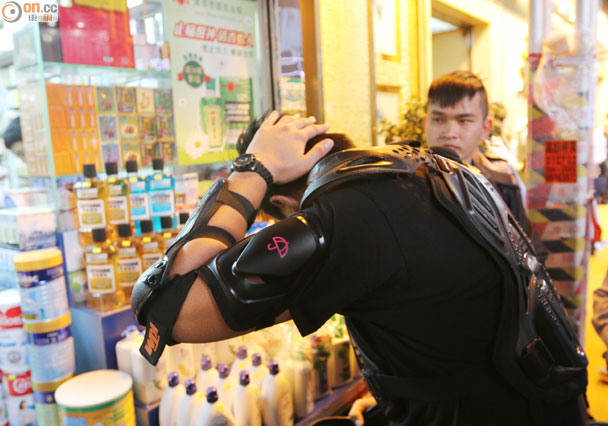
Addendum
https://www.youtube.com/watch?v=RxcaI_zMmHk 20-minute-long interview.
Addendum (Oriental
Daily) January 11, 2015.
The Justice Alliance and the Alliance in Support of Our Police
Force set up a street booth in support of legislation that criminalizes
insulting the police. Captain America showed up with a British flag. He was
cursed out by ten or so persons. They called him a Chinese traitor. The police
maintained order. In face of the angry crowd, Captain America ultimately folded
his British flag and left under police escort.
Addendum
https://www.youtube.com/watch?v=73dWlMucTzw At an Alliance To Support Our
Police rally on January 25 2015, Captain America showed up with a Hong Kong
independence Dragon-Lion flag. But he was outnumbered. A man threatened to set
the flag on fire with a lighter, so Captain America quickly left the scene.
Addendum (Oriental
Daily with video) January 30, 2015. See also Bastille Post
https://www.youtube.com/watch?v=5I81SMNqQPQ.
The lifeguard Andy Yung Wai-yip was charged with two common
assaults against anti-Occupy taxi drivers who were trying to clear the
road obstructions on October 24 and November 3 2014 respectively. Yesterday, he was
allowed to post a $2,000 bind-over order and put on probation for 12 months. In
addition, he has to compensate the two victims $500 each. According to the
prosecutor, the defendant wore body armor at a sensitive time and caused
uneasiness among people. Therefore, the prosecutor asked to confiscate his
equipment. After consideration, the judge decided to confiscate only his Captain
America shield.
Internet comments:
- Amazing! Only twelve months probation for two common assaults.
Meanwhile the guy who picked up $161,500 dollars that fell from an armored car
got 5 months' jail time. This society is out of whack.
- He doesn't need to go to jail. He is suffering from bipolar disorder and
belongs in the Castle Peak Psychiatric Hospital.
- The next time you see this guy in the street (for example, at
the February 1st Civil Human Rights Front march, he says that he is bringing his
Hong Kong independence flag), you can provoke him. If he punches you, he goes
directly to jail for violation of his good behavior probation terms.
- What happens to Captain America when his shield is confiscated?
- How come Thor, Iron Man and The Hulk didn't show up at courtside
to give him support?
Addendum: (Oriental
Daily) March 1, 2015.
Captain America
also showed up in full armor, including helmet, goggles, armor plate, knee
guards, elbow guards and gloves. He said that he wanted to participate in the
march, but he got off at Yuen Long Station instead of the Long Ping Station. But
as soon as he stepped out on the platform, he was attacked by three middle-aged
men without cause. Eventually he arrived at Long Ping station. He said that the
full armor was used to protect himself and that he did not intend to attack
other persons.
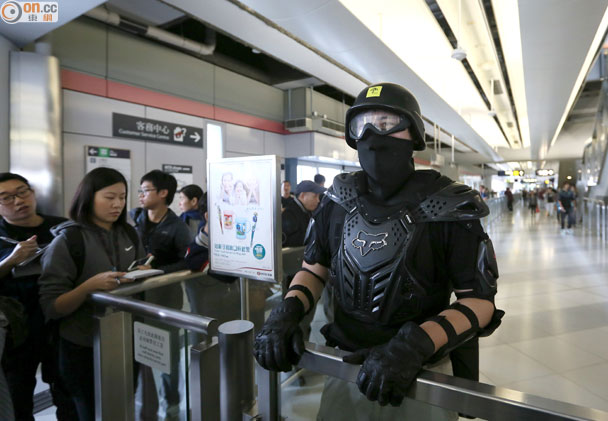
https://www.youtube.com/watch?v=hfEXICLs2Z0
https://www.youtube.com/watch?v=_P0Qvk35IEw
Addendum: (YouTube)
Letv: The autistic Paralympics swimmer Andy Yung from Hong Kong.
Addendum: (Apple
Daily) 14:39 March 15, 2015
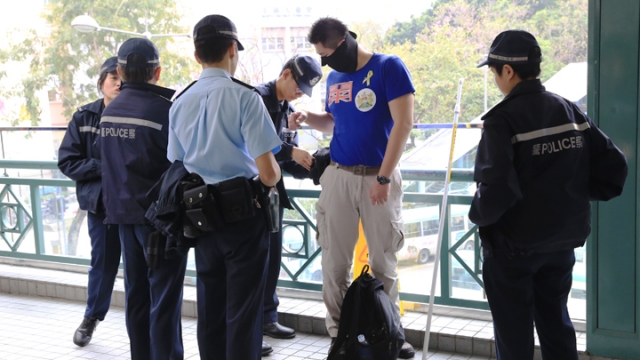
Captain America Andy Yung was
walking on the overpass from Sheung Shui Plaza to the MTR station when he was
intercepted by police officers and searched. He said: "I knew that they want to
deliberately harass me, because more than a dozen uniformed police officers came
to search me." He said that he expected to be searched and therefore he won't
bring any dangerous materials on him.
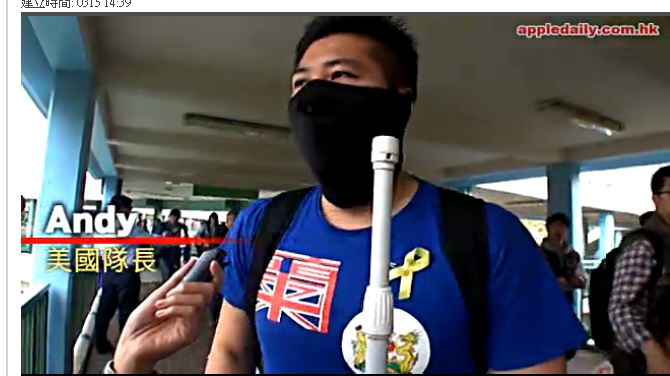
Internet comment: When you
dress up like a robber, it is a wonder if the police didn't stop and search you.

Eric ("The Painter") Poon Won-tong (originally posted at
#285)
(Sing
Pao) June 30, 2015.
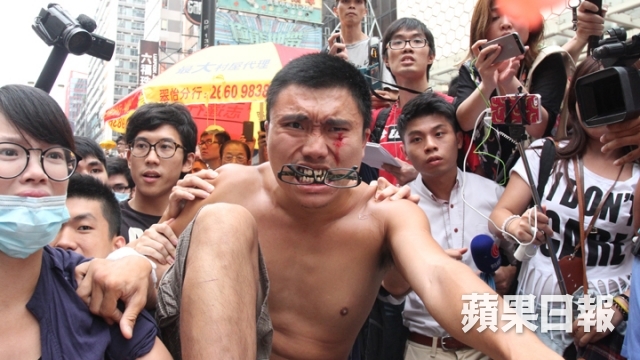
27-year-old Eric Poon (nickname
"Hexagonal wrench") has been arrested by the police. Poon is suspected of having
accosted a girl under the age of 16 and offered to show her some paintings. Then
he kissed her against her will. The girl lodged a complaint with the police.
(Wen
Wei Po) July 1, 2015.
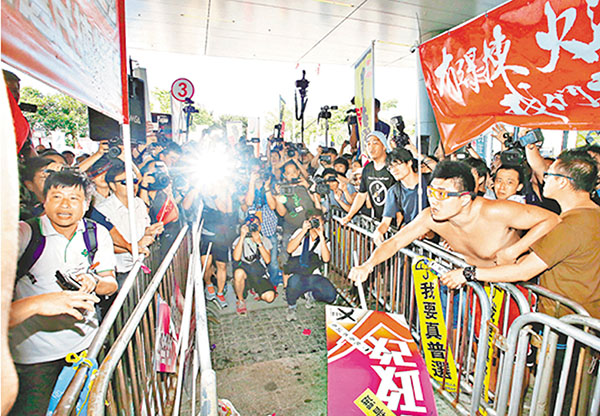
Eric Poon showing his form with spitting, cursing
and making obscene gestures
On June 11 2015, a fourteen-year-old
girl was molested by a man under the pretext of showing her some paintings. Her
mother learned what happened and filed a police complaint on June 25. According
to the court records, a man with the same name (Poon Won-tong) was found guilty
of raping/molesting a 14-year-old girl in Tuen Mun in June 2006 on three
separate occasions (in a parking garage platform, a restroom for handicapped
persons in a recreational area and in a parking garage stairwell). At the time,
the defense claimed that the defendant had previously sustained an injury to his
brain and therefore he has sub-normal intelligence.
(The
Sun) July 14, 2007. A 14-year-old runaway girl was raped/molested thrice
by a young man named Poon Won-tong on three occasions, once on a table tennis
table for the public in Shan King Estate parking garage, once in a public
restroom for physically handicapped persons in Yeung King leisure park and once
in the stairwell of the Shan King Estate parking garage. On the first occasion,
the defendant tied up the girl and raped her on top of the table tennis table.
On the third occasion, the man forced the girl to commit fellatio. On one
occasion, there was a under-aged male who watched the rape while fondling the
girl. The defense claimed that the defendant is mentally retarded due to brain
damage.
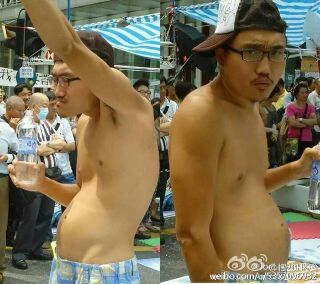
(Apple
Daily) July 14, 2007. According to the defense lawyer, the defendant
dropped out of secondary school Form 3. His parents got divorced last year. Last
October, the defendant was taken to mainland China to live with his maternal
uncle to learn interior decoration. After the police contacted his father over
this case, the father went to mainland China and brought the defendant back to Hong
Kong to surrender to the police. According to the prosecution, the
defendant and the victim agreed to run away on June 6. On the same day, he took
her to the platform in the Shan King Estate parking garage and asked for sexual
intercourse. She refused. He used a towel to tie her hands up and carried her
onto the table tennis table to rape her. Afterwards, the defendant took her into
the public restroom for physically handicapped persons in the Yeung King Road
leisure park. At the time, a 14-year-old boy asked to be allowed to watch. So
the defendant removed the victim's clothes, used a towel to tie her hands up and
raped her. On the same day, the defendant woke the victim up in the parking
garage stairwell and forced her to engage in fellatio.
(Oriental
Daily) July 29, 2015. At 3pm on May 21 2015, the defendant Eric Poon got into
an argument with a worker on the fourth floor of the Fa Yuen Street Public
Library (Mong Kok). The worker asked Poon to be quiet, but the Poon said: "If you don't
know who I am, I will tell someone to beat you to death." The defendant was
found guilty of criminal intimidation and sentenced to three months in jail.
Video:
Eric Poon looking for a one-to-one fight at the Mong Kok Public Library.
0:55 Poon: You shut up! Leave!
1:05 The other man who is a head shorter than Poon: Leave? How can I leave? You
are blocking my way!
1:07 Poon: Leave! Fuck your mother! Are you scared? Let's have a one-to-one
fight!
(Wen
Wei Po) August 1, 2015. On January 3, 2015, Eric Poon is suspected of
injuring a male pedestrian named Law inside Hollywood Plaza (Mong Kok). Poon has
been charged with one count of common assault.
(Oriental
Daily) August 15, 2015. The trial of Eric Poon on charges of sexually
molesting a female minor will be held on October 5. The defendant Eric Poon
pleaded not guilty. The prosecutor said that there will be four witnesses.
Because the victim is a minor who was sexually assaulted, she will testify via video conference. The
prosecutor said that the defendant is serving three months of jail sentence for
criminal intimidation while still awaiting trial for three other cases. Since
the defendant had been known to skip bail before, the prosecutor asked that the
defendant not be allowed to bailed out. The magistrate ruled that the defendant
will be detained until the trial.
(Oriental
Daily) September 24, 2015. Eric Poon filed an appeal on his 3 months
jail sentence for criminal intimidation. He was not represented by a lawyer. He
said that the original magistrate was wrong to accept the testimony of the
victim, because when Poon said "Brothers", he was only referring to ordinary
citizens and not triad members. In addition, that testimony diverges from that
of another librarian. He said that the case was trivial and therefore should not
have ended up in a jail term.
Poon said that he has been a
street artist for more than a decade, and he sometimes took part in the Occupy
Movement. Therefore, he has become a semi-celebrity. Since entering jail over
this case, he has been beaten by correction officers and inmates on an almost
daily basis. He was frequently harassed about whether he was paid to take part
in Occupy Central. This
has caused his fragile mind to suffer immensely. Therefore he asked the judge to
release him immediately.
The judge said that the Occupy
Movement is unconnected to the present case. Poon had to demonstrate how the
prosecutor failed to accuse him of a crime without reasonable doubt.
Furthermore, this was not Poon's first offense because he has multiple criminal
records/jail sentences since 2012 including assault, criminal damage of
property, possession of weapons of assault, etc. The judge denied the appeal.
(Oriental
Daily) October 9, 2015. Eric Poon was charged with assaulting an
off-duty police officer on January 3, 2015 on Sai Yeung Choi Street, Mong Kok.
Poon pleaded not guilty. The magistrate said that the defendant was not a
reliable witness given that he has 8 previous violence-related cases. However,
considering that the police officer was not seriously injured, the magistrate
sentenced Poon to 10 days in jail. It was disclosed during the proceedings that
although Poon claimed to be a designer by profession, he is receiving $2,100 in
social welfare payment per month.
(Facebook)
At 11pm on November 3 2015, Eric "The Painter" Poon was arrested by the police on Sai
Yeung Choi Street South on suspicion of sexual assault on his former girlfriend.
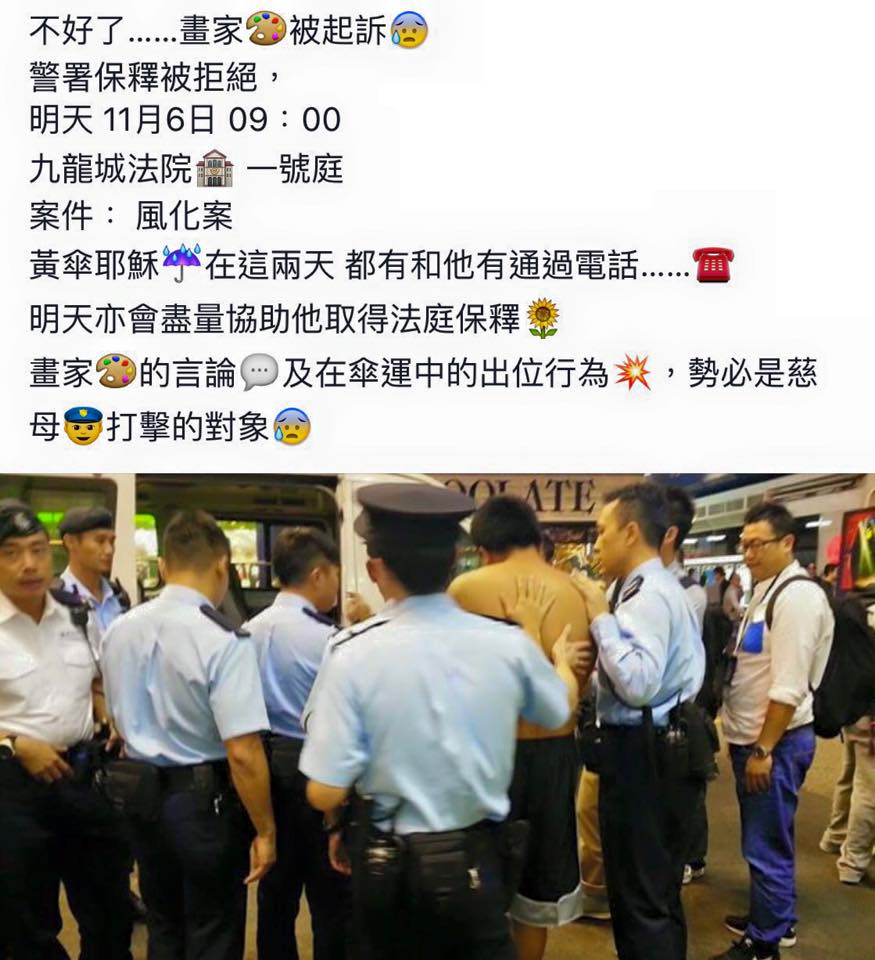
Oh no! ... the painter will be
prosecuted.
The police refused to grant bail
Kowloon City Court Number one courtroom November 6 09:00
Case: Sexual misconduct
Our Yellow Umbrella Jesus (Father Franco Mella) has been in contact with him by
telephone over the past two days
Tomorrow he will try his best to help him post bail.
The painter's actions and words stood out during the Umbrella Movement
He is necessarily the target of oppression by the police.
(Wen
Wei Po) April 22, 2016.
The victim is a 40-year-old female
who has been diagnosed to be moderately mentally impaired. She met Eric Poon
during the Occupy Mongkok period and became steady. On October 31 last year,
Poon forcibly kissed the victim in an elevator in Mong Kok. The incident was
captured by closed-circuit television. Afterwards, Poon took the victim into a
backlane and touched her breasts and vagina. On the day after, the victim told
fellow churchgoers about the incident, and they took her to file a police
report.
The magistrate said that the
defendants had been jailed previously for similar offenses. In the current case,
he sexually assaulted a victim who was mentally defenseless. This makes his
action even more disgusting. Therefore the magistrate sentenced the defendant to
10 months in prison.
According to the court file, Eric
Poon has close to 30 cases under his name. Eight of these involved violence and
the rest are about sexual assaults and criminal intimidation.
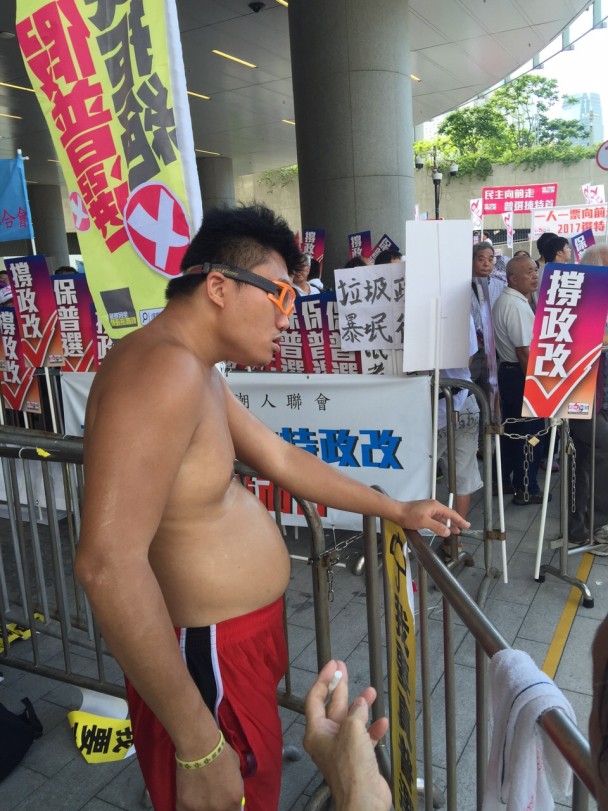
Here is a collection of YouTube
videos on Eric Poon:
Video: Eric Poon lying down on the
ground and being interviewed by Simon Ng. He equates the 87 tear gas canisters
in Admiralty with the June 4th 1989 Tiananmen Square incident. The closing comments:
"What is
your name?"
"Eric."
"Everybody please support Eric and
donate more money."
Video:
Unidentified man punched Eric Poon in the eye with a straight right during an
attempted clearance of Mong Kok by unidentified individuals in civilian clothes.
Video:
eetv interviewed Eric Poon about being injured on his eye previously. "It was
around 3:50pm on October 22. I was over there by the intersection of Dundas
Street and Nathan Road. A group of people who claimed that they were bailiffs
... they claimed themselves ... that is to say, they are fakes. They dismantled
our roadblocks. About ten of them. There were more of us than them." "If there
were more of you, then how did you end up bleeding in your eye?" "We wanted to
pull the iron barricades back. Then there was was a Green Ribbon who wore
grey sunshades. He held scissors. He cut up our stuff to take away. I pushed
him. After I pushed him, I scratched his eyeglasses because I had longer arms. I
wanted him to show his face. He was displeased. He hit me and broke the left
side of my eyeglasses. That was right in front of the police. The police didn't
care." "Did you ask for police assistance?" "Yes, then we went down to the
police station. The police released him immediately. I saw it. My friends saw
it."
Video: Eric Poon and
Ng Ting Pong
expounding on the finer points of democracy in Occupy Mong Kok area.
Video:
Eric Poon has a confrontation with a Hong Kong Broadband salesman outside
Hollywood Plaza on Sai Yeung Choi Street South, Mong Kok. Lots of chest bumping
and loud talking.
Video:
Eric Poon quarrels with an unidentified man holding a camera. He begins with
showing off his middle finger and "What the fuck! You know!" in English. He said
that he was injured. "All the newspaper front pages covered the story." The
unidentified man asked: "What has this got to do with us?" Poon said: "Of
course, it has to do with you people. You work for C.Y. Your mother!" The man
asked: "This has to do with me. You answer me first." Poon said: "Yes, it's got
to do with you. Fuck your mother! Dickhead! Use your brain! You are giving us
post-80's a bad name!" The man said, "Thank you for your invaluable opinion." Poon
said: "Invaluable opinion? Your mother and your father will both drop dead and go to
hell!" The man said: "Oh, so you are the one can decide. I fully understand." Poon said: "This is what your fathers CY Leung and Xi Jinping said." The man
said: "If my father were CY Leung or Xi Jinping, I wouldn't have to stand here."
Poon said, "Yes, you stand here because you get paid. Two hundreds dollars a
day. I know." The man said: "Not as much as what you get, not as much as what
you get." Poon said: "I earn my own money." The unidentified man
(sarcastically): "Oh, I
understand!" Poon said: "I paint, you dickhead! Have you ever painted? Fuck your
mother!"
Video:
Eric Poon using a megaphone to scream obscenities at everyone and everything.
Video:
Eric Poon rambles on with a speech on Occupied Nathan Road in the first 1:38 of
this video. He is discussing the major incident that took place on August 4,
2014. The newspapers did not report on this matter. In summary, Poon went
down to Mong Kok to cause trouble and the police arrested him. After Poon spoke,
the two other
speakers who followed on are a scriptwriter who is reading from his written script and a housewife who has to
get on welfare because her husband has cancer. They have occupied Nathan Road
because of these personal issues.
Video: Eric Poon bullies a woman as he slaps her hard in the head. When
others tried to get him to stop, he said: "Shut up! It's family business!" The
woman said: "I really did not borrow any money." But Poon said: "No? You stole
my money until there's only 24 dollars left." A person came up to intercede but
Poon pointed two fingers at him and said: "None of your business. It's a
personal matter." Although there were many Yellow Umbrellas around, nobody
stopped Poon who eventually left on his own.
Video:
Occupy Mong Kok was cleared on November 25, 2014. At 1:23, Eric Poon uses a
mini-megaphone to babble incoherently as the audience looked perplexed while the
police looked bemused.
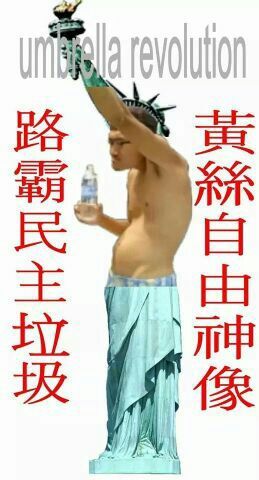
Umbrella Revolution
Road blocker democracy trash
Yellow ribbon freedom statue
Video: At 18:00 on December 6 2015, pro-democracy activist Eric "The
Painter" Poon appeared to be suffering another relapse in his mental ailment. He
cursed out pedestrians and charged into a store to curse out the sales
assistants. The store had to summon the police.
Video: At 18:15 on December 13, 2015, pro-democracy activist Eric "The
Painter" Poon sat on a chair and used a megaphone to launch a stream of
obscenities to nobody in particular.
Videos:
Part 1 and
Part 2. July 31, 2016. Pro-democracy activist Eric "The Painter" Poon
confronts members of the Politik Social Strategic.

Ava Chan ("The Cross-dressing Guy") Mei-kay
(originally posted at
#040)(Oriental
Daily) 4:50am, November 16, 2014
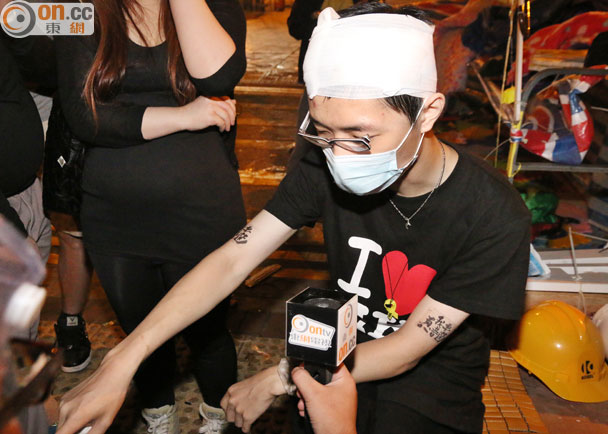
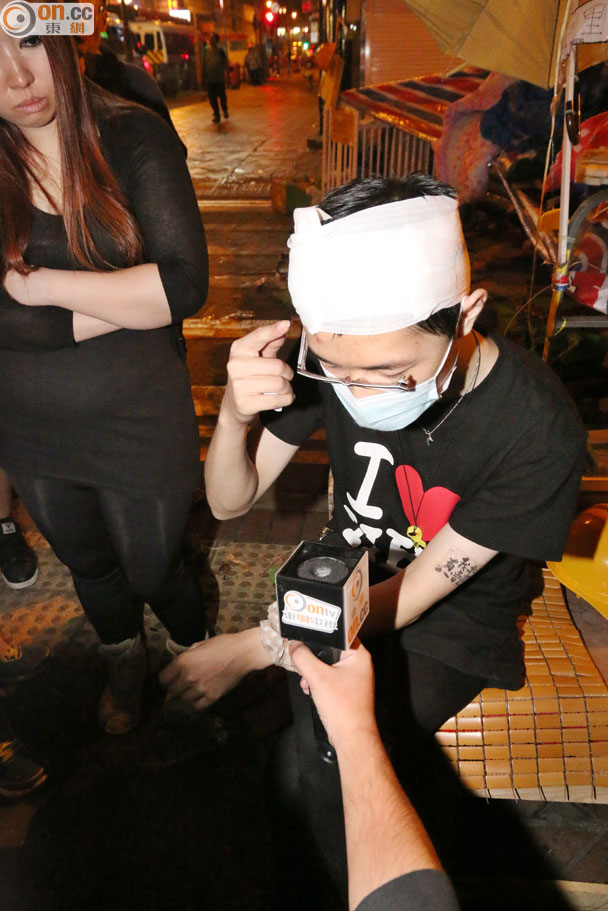
In the early hours of morning, there
was another clash between civilians and police. The police used pepper spray at
one point. A demonstrator claimed to have been injured in the head after being
clubbed by the police. According to Ah Kay, who is an MTR worker and has stayed
in Mong Kok for for many times, at the time, she was staying behind the
barricades and did not take part in the rush against the police. But three
police officers accused her of tossing a helmet, dragged her out and used batons
to club her head. She was dragged along the ground for at least 2 meters,
causing multiple injuries on her body.
After being treated at the emergency
station, Ah Kay had to call an ambulance for further treatment. She declined to
be taken down to the hospital. She showed her injuries to reporters, including
scratches on her forehead and arms and a broken frame on her eyeglasses. She
also lost her shoes during the confusion, and she had to borrow shoes from a
friend to wear.
In the Apple Daily news video report (
http://www.youtube.com/watch?v=tj1PWaLN8Dk ), the relevant action starts at
around 1:55.
(VO) "A man was suspected of
being hit in the head by the police and pulled down to the ground, and then
dragged on the ground for four meters before being subdued."
(Male voice) Two police came up and
said that I tossed an object. They dragged me out, and use police batons to bash
my head.
There is another long video of the same
incident
http://www.youtube.com/watch?v=O6XMMM5rfGM . The relevant action starts at
around 3:16 when the police pushed forward and eventually gang-tackled somebody.
(Sing
Tao) 5:55am November 7, 2014
Ah Kay dressed as a female and
claimed to be 23 years old and has been staying with Occupy Mong Kok since the
first day. Since she is qualified as a medical emergency worker, she has
helped to protect other female demonstrators. She claimed that she works as
an MTR operations officers and has used her vacation days and leave-of-absence to work for Occupy
Mong Kok.
At around 2am, Ah Kay pointed at
her wounds that were bandaged by volunteers and showed reporters the scratch
marks on her arms. She recalled how she was dragged out of the demonstration
zone by the police, pushed to the ground, kicked and hit on the head with
police batons. Her eyeglasses were smashed. She insisted that she did not
throw a safety helmet. She complained about police violence.
At around 7am, Ah Kay complained
that her head injuries were hurting. She felt cold and was vomiting. An
ambulance was summoned. Emergency workers treated her and then covered her up
in an aluminum blanket and took her to the hospital for further treatment.
According to the Hospital Authority, they treated four persons from the
Occupy areas last night. All of them are male, none female.
The public is interested about
whether Ah Kay is male or female when she is on the job for the MTR. This
newspaper queried the MTR. The MTR spokesperson said that, under normal
circumstances, they will not confirm whether or not someone is an employee of
theirs. Thus, the MTR declined to answer our question.
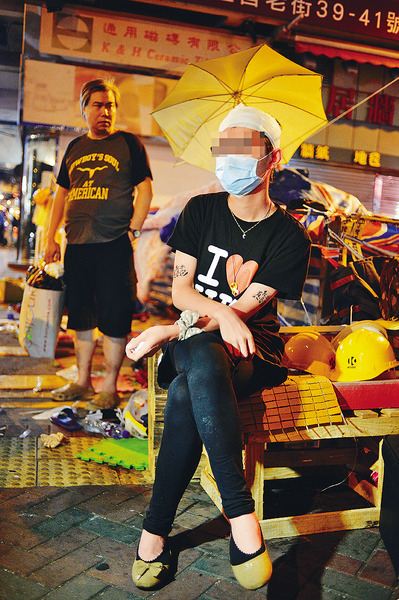
(Passion
Times) The demonstrator Ah Kay narrates how he was assaulted by the
police, his version being completely different from that of Police Public Relations
Bureau Senior Superintendent Kong Man-keung. November 7, 2014.
Ah Kay told our newspaper something
different from Kong's statement. Ah Kay said that he was injured by police
batons. He was also kicked wildly by policemen. Ah Kay said that he went to
get a medical examination, and all he told the police was "I have nothing to
say."
0:43 (Ah Kay) I was by the road
block in the rear to keep guard. I had to look after the other girls. I had
received the directive that there would be some chaos. For our safety, I
told them to come in and we locked the place up. Then, for no apparent reason,
a group of policemen rushed over. Two policemen dragged me outside. They
said that I had tossed a helmet. But there was no helmet near me. Nothing
whatsoever. Many people witnessed it, some took videos to show that I did
not fight back. They pulled me over the table, then they piled on me on the
ground. They held my head down. They hit me once on the head with a baton.
They held me down on the ground. They held my legs down. They kicked me here
ten to twenty times. They dragged me into the road. They dragged me over to
the metal barricade. Then another group of policemen took me over further
over to that location. That was it.
(Oriental
Daily) November 8, 2014
The "Occupy Mong Kok girl"
who was
bashed in the head turned out to be a cross-dressing liar. After the series
of clashes in Mong Kok, "she" claimed to be Ms. Chan, wanted to be called Ah
Kay and claimed that she worked as an MTR operations officer. As a result, "she" became an
Internet celebrity. "She" also accused uniformed police officers of dragging
her on the ground two meters out of the tent, punching her, kicking her and
bashing her head with police batons.
It turned out that Ah Kay is a
cross-dressing man named "Brother Ka-chun" who has a prior record of fraud.
He is an unemployed young man. He told the police that he was actually
injured by unknown individuals with hard objects, not by police officers.
His mother disclosed that her son told her that he had gone to Macau, so she was
unaware that he was in Occupy Mong Kok. She only found out after some
relatives/friends told her that her son was injured in Mong Kok.
This "Occupy Mong Kok liar" has a
family name of Lian, he is 23 years old and his identity card marks his
gender as male. Early morning on the day before yesterday, he told the media
that his name was Ah Kay, his family name was Chan, he was of mixed
Chinese-Taiwanese-Japanese blood, he worked as an MTR operations
officer, he was an IVE student, he was using his vacation time to work on
Occupy Mong Kok and he was in charge for the road block group. He said about
the head-bashing: "I was dragged out of the tent by the police on the ground
for about two meters. During that time, policemen bashed me with batons,
kicked and punched me for more than ten times. They picked me up and threw
me down on the ground again. I had difficulty breathing." Although he
dressed in a feminine manner, reporters were suspicious about his voice and
gender identity. However, he insisted that he was a girl.
At around 6am that morning, Ah Kay
felt ill and was sent to Kwong Wah Hospital. As the police got ready to take
down his statement, he claimed that he was injured by unknown persons with
hard objects and he refused to make a statement to the police. He left the
hospital on his own. However, his identity has been revealed after his media
exposure. He is presently unemployed. In 2009, he was suspected of
defrauding people by pretending to be a movie star scout. His mother claimed
that her son told her previously that he was going to Macau with some
friends and then lost contact. Yesterday, a relative/friend was watching
television and told her son was injured in Mong Kok. She said that he son
dropped out of school at the Form 2 level. She was giving him HKD 60 in
spending money per day. When asked why her son likes to cross-dress, the
mother huffed and said, "He is crazy all the time."
Yesterday, our reporter located Ah
Kay again. He explained that he was a hermaphrodite. He was said that he
declined to make a statement to the police due to concerns about privacy.
According to Police Public
Relations Bureau Senior Superintendent Kong Man-keung, a demonstrator
claimed to have been in the head by the police and kicked more than ten
times. When the police at the scene tried to learn what happened, this
demonstrator said that he was assaulted by unknown plainclothes persons with
unidentified hard objects, and not as he claimed on camera of being
assaulted by the police. This man was sent to the hospital, after which he
indicated that he would not provide any information and he did not file any
complaints. The man left before undergoing a medical examination. The case
would be followed by the Mong Kok Crime Investigation square as a case of "an
assault that caused actual injuries."
(Wen
Wei Po) November 8, 2014
... According to an Internet user
at the "Salute the Hong Kong police" page, this demonstrator at first
"deceived the reporters by claiming to be female, and also lied about not
being 18 years old yet." He even claimed to be an MTR worker. But MTR does not
hire anyone under 18 years old or with tattoos on their arms, so the lie was
exposed already.
When the demonstrator registered at
the hospital, he not only refused to show his identity card but he publicly
stated "I did not bring my identity card" while holding the said card in his
hand. He was rude to the hospital workers. He claimed that he was 23 years
old and he claimed to be unemployed. After registering, he refused to
undergo medical examination or make a statement to the police. He changed
his story and said that he was knocked down by unidentified persons during
the chaos. He was declined to let the hospital workers remove the bandage on
his head so that they could inspect his wounds.
According to what this Internet
user said about what eyewitnesses at the emergency room saw and hear, this
demonstrator had his lies exposed and he changed his story to: "I took money
from Occupy Central to smear the police" and "I received $3,000 in wages
from Civic Passion." The demonstrator also said that all the relevant
information involves "personal privacy and therefore the police and hospital
staff must not disclose this to the outside." But those in the emergency
room "could hear it too."
Addendum: (Oriental
Daily) December 31, 2014.
At around 3pm on December 31, a
person dressed as a female had an argument with another individual over a
box lunch outside the Legislative Council building entrance for legislators.
The person got very excited and used his head to ram and kicked the metal
door. The security guards summoned the police who came and arrested him for
criminal destruction of property. The police were skeptical about the
identity of the person, who claimed to be a trans-sexual. The person was
wearing a bra at the time but changed back into male clothing and was taken
down to the police station.
According to information, the
23-year-old man named Lian had a prior fraud record in 2009 for posing as a
movie scout. He was previously injured in the Occupy Mong Kok area and lied
about what happened. After the clearance of Mong Kok, Lian moved over to the
Tim Mei Road tent city.
Addendum:
Oriental Daily (February 15, 2015) On this afternoon, Internet users came
to join the "Defend Sha Tin, oppose parallel traders" Action. Some of the
demonstrators got very excited and yelled at anyone hauling luggage because they
must be parallel traders, a cosmetics shop near the Yata
Department Store in Sha Tin had lowered its gates, so some of the customers were trapped
inside. Meanwhile a Ms. Chan hauling a luggage was identified by the
demonstrators as a parallel trader and they surrounded her and cursed her out.
In the struggle, she was also accused of pushing the Mong Kok cross-dressing guy
Ah Kay down on the
ground. Afterwards, Ms. Chan told our reporter that she is a Hongkonger who went
to Yata to buy her family's Lunar New Year items. She said that the
demonstrators were out of line.
https://www.youtube.com/watch?v=cvs2ZHZVdm8 Video posted by SocREC reporter
Ava Chan, who happens to be Ah Kay now working as a reporter using a pseudonym.
This title of this report says that a reporter was pushed by two female
mainlanders.
Addendum: (Oriental
Daily) May 22, 2015
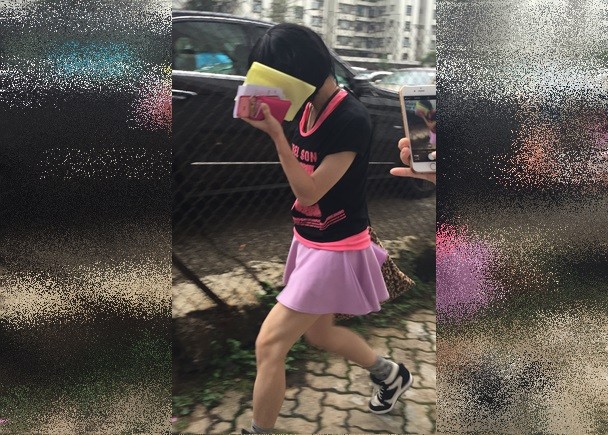
24-year-old unemployed man Chan
Mei-kay appeared in Eastern Court today to answer a charge of criminal
destruction of property. The defendant showed up in court wearing a short
pink skirt. The hearing was postponed to July 3rd.
Video:
Bastille Post (July 3, 2015)
Addendum: (TMHK)
Interview with Chan Mei-kay on a Mong Kok police station attack incident, in
which he gives a confused account of whether he is a Yellow Ribbon or a Blue
Ribbon.
Addendum: (Oriental
Daily) August 28, 2015.
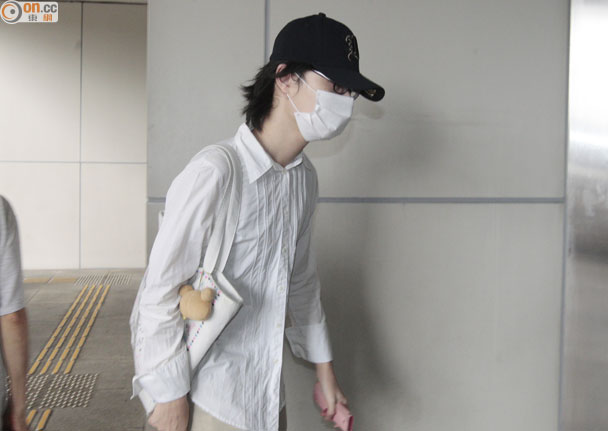
Yesterday the defendant Chan
Mei-kay pleaded guilty to one count of criminal property damage at the
Eastern Court. The defense claimed that the 24-year-old defendant works for
an Internet media outlet. At the time of the incident, the defendant was
gathering news and not challenging the authorities. The defense also claimed
that the defendant realized that he had mental and behavioral problems when
he was 7 years old, and has been taking medication and visiting doctors
since. In June this year, he was hospitalized. The defendant said that he
wanted to do good journalistic. This incident took place in a moment of
rashness. He pleaded for leniency. The defendant has two prior records for
different crimes. The defendant was not cross-dressing on this day.
The prosecutor said that the repair
for the steel door cost $35,000 and wanted damage awards. The magistrate
said that the prosecutor failed to produce a receipt and instructed him to
seek civil damages instead. Sentencing will take place on September 11,
2015.
Addendum: (Oriental
Daily) September 11, 2015.
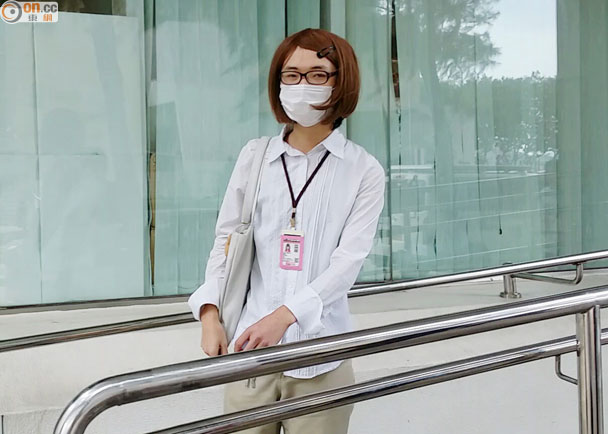
The defendant Chan Mei-kay had
previously pleaded guilty to one count of criminal damage of property. The
defense said that the defendant was found to have mental and behavioral
problems since age 7 and has been under medication since. The defendant
committed this act in a moment of rashness, and hopes for a lenient
sentence. The magistrate sentenced him to 15 months of probation.
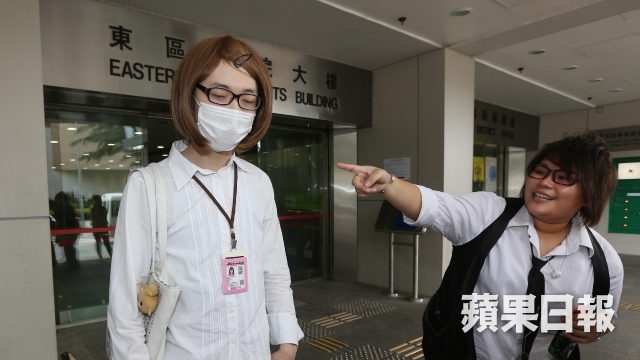
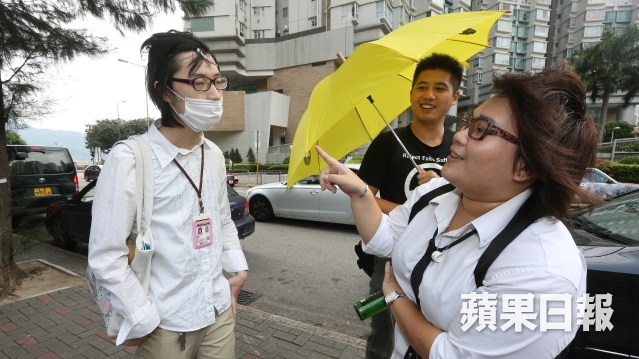
As Chan left the courthouse, he was
assaulted by four individuals, including regular demonstrator "Captain
America" Yung Wai-yip. These people held two bottles of wine and
yellow umbrellas. One of them was a woman who said that Chan's hair is
filthy and therefore pulled her wig off and tossed it on the ground. The
four then cheered. Chan had to flee back to the courthouse. Chan said that
he has gender identification problems and he begged the media not to call
him 'The Cross-dressing Guy." He wanted everybody to let him me. He
emphasized that all reporters should be neutral, without choosing to be
either Yellow Ribbon or Blue Ribbon. He said that he reserved the right to
hold his attackers accountable.
P.S. Chan told the Oriental Daily
that he does not want to be called "The Cross-dressing Guy." Oriental
Daily's published report has the title "Cross-dressing male reporter
sentenced to probation for Legco property damage."
Addendum: (evchk.wikia.com)
http://evchk.wikia.com/wiki/%E7%B7%B4%E5%AE%B6%E4%BF%8A
A compilation of incidents
involving the individual named Lian Ka-chun who has many more aliases.
- In 2008, an Internet user named
Tang Ka-man claimed to run an Internet radio station and wanted singers to
submit songs to play. In 2009, the person running that radio station
was sentenced to one year of probation on two counts of fraud. The
individual threatened to commit suicide when exposed. He changed his user
name to "The person who is going to be committing suicide soon." Internet
users said that he must be trying to use potato chips to slit his wrist. The
address posted by Tang Ka-man matches the address of the individual in this
case.
- In 2009, the individual was wearing a Kowloon-Canton
Railway era uniform on the MTR West Rail Line. The uniform was company
property. When Kowloon-Canton Railway merged into the MTR, all employees
were supposed to turn in their uniforms. This uniform belonged to the father
of the individual. The father did not turn in his uniform when he left KCR.
On the particular day, the individual wore his father's uniform and was
stopped. He had to take off his uniform and left
wearing an undershirt.
- In May 2009, a person pretending to
be 17-ear-old singer Renee Lee went out to have cyber-sex with others. A Golden Forum
user pretended to be interested and identified this individual to be the
perpetrator because they have the same address. The real Renee Lee condemned the
individual as a pervert.
- In June 2011, he helped out at a
bus wrecking yard, and ended up stealing 17 license plates and $1,700 in
cash. The owner let the individual in because he had a MTR employee pass.
The owner made the individual the stolen property and did not press charges.
The individual then told the Internet website evchk.wikia to remove the
information on that case because he has already filed a police report. However, he was
unable to provide a police file number. He forwarded an audio tape, but the
policeman on the telephone call was telling him to file a civil lawsuit because the police do not
handle libel cases.
- In early 2015, the individual
joined the SocREC group as the reporter named "Chan Wang Ava." He claimed to be a Japanese-Taiwanese MTR
senior manager who lived at Tim Mei Road. He was appointed the Legislative
Council reporter for SocREC. However, he kept violating Legco regulations by staying
overnight and hogging work space. He kept losing emotional control, ramming
his head against the wall, using foul language against the police and
yelling that he was going to commit suicide. Some SocREC reporters demanded that he
produce proof of identity, but he refused. Some SocREC reporters demanded that he
resign, but the person in charge of SocREC refused on the ground that personal conduct
was not relevant to job performance. As a result, more than half of the SocREC reporters resigned.

Yan ("Occupy Mong Kok woman") How Yee
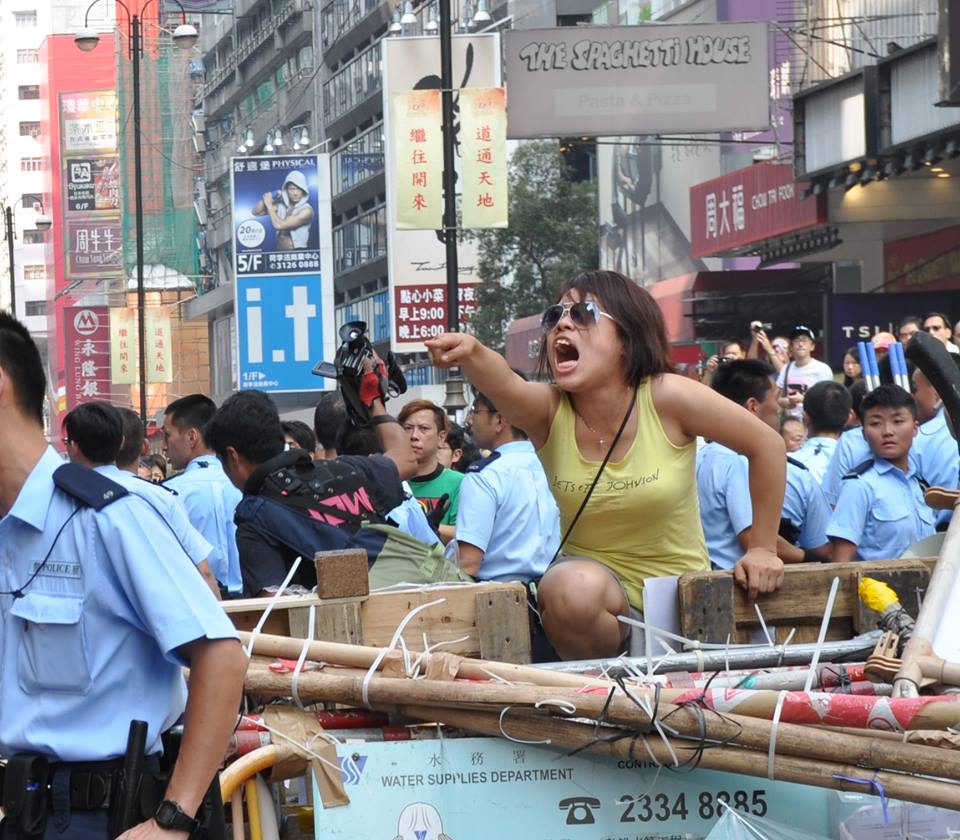
(East
Week) Issue #583.
It has been more than one month
since the Occupy Movement got started. Some people describe the Occupy
Admiralty area as "Utopia." The Occupy Causeway Bay area is so quiet that it
tends to be forgotten. But the Occupy Mong Kok area is volatile, with
bloodshed and large-scale clashes possible at any moment.
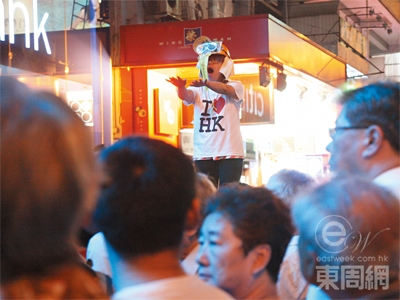
Yan ("Occupy Mong Kok woman") How Yee
climbed on the barricades and did the zombie hop last night
Our reporter observed the Occupy Mong Kok area
for many days. There were plenty of homeless people, marginal young people
and mental patients hanging around. Their idiosyncratic behaviors were truly
astonishing. There is a supply station across the Bank Centre at which a
vicious-looking, foul-mouthed woman took charge. When someone takes more
supplies than necessary, she was would curse out: "Everybody is allowed only
one bottle of water. If you take more than one bottle, I'll fucking beat you
up." She not only likes to scold people, but she is also emotionally
unstable especially in the presence of persons with different opinions.
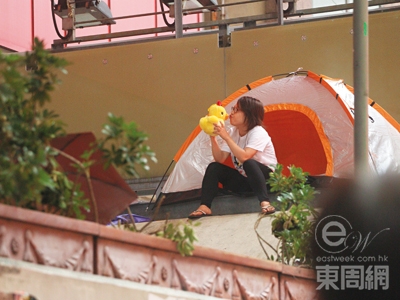
Yan How Yee kissing a duckie in front of her
personal tent on top of the Mong Kok MTR Nelson Street entrance
(Oriental
Daily with video)October 24, 2014.
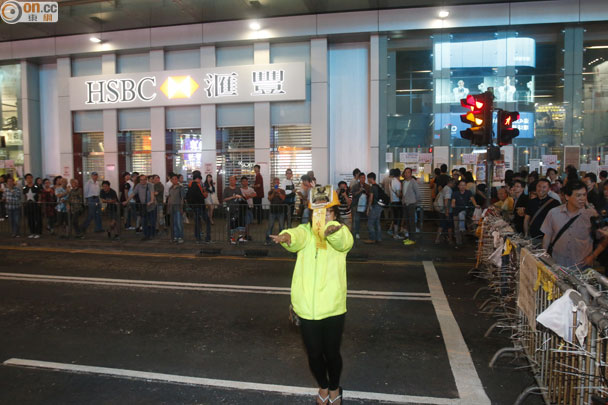
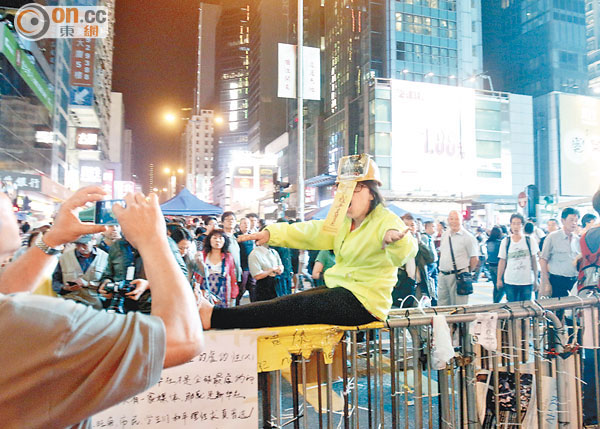
Last night around 7pm, a woman wearing a
yellow/green jacket jumped around like a possessed zombie with a yellow
sticker saying "I want genuine universal suffrage" hanging down in front of
her head. This angered some Occupy Mong Kok members because they felt that
she disrespected the movement.
(The
Sun) October 26, 2014.
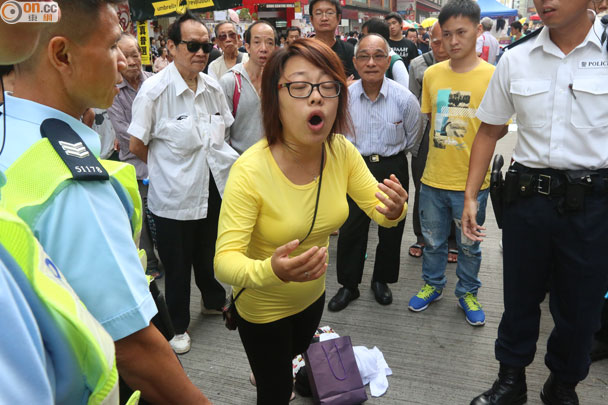
Yesterday
morning at 8am, there was a quarrel between a Food and Hygiene Department
contractor and an old woman scavenging for cardboard paper. 25-year-old Yan
How Yee in yellow joined the quarrel together with a 38-year-old woman named
Lau in white. The woman in yellow and the woman in white went from verbal
jousting into physical tussling onto the roadway. The woman in white yelled:
"Aren't you a volunteer? Do the volunteers transcend all authorities? Are the
volunteers allowed to beat people up?" The woman in yellow was more agile and
jumped onto the roof of the MTR station entrance and cursed back. The police
arrested both women for fighting. Both women claimed to be injured.
(Oriental
Daily with video) October 30, 2014.
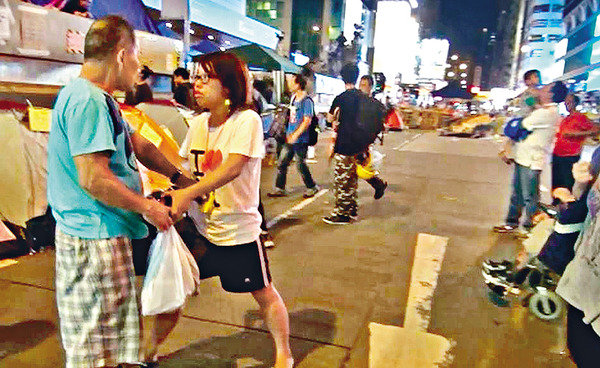
Last night a middle-aged man came down to the
Occupy Mong Kok area to look for his daughter. There he found his daughter
and the two had a loud quarrel in the streets, including pushing and
shoving. Afterwards, the daughter Yan How Yee told the press that she was
touched by the television news report about the police using tear gas to
disperse demonstrators and therefore she volunteered to work in Occupy Mong
Kok.
25-year-old Yan How
Yee is a single parent with a one-year-old son. Since September 30, she has
left her son in the care of her parents and elder brother and gone to live
in the Occupy Mong Kok tent city, going home to visit her son for only two
hours a day. Yan How Yee said that she understands that her parents are
worried about her personal safety. She is sorry for neglecting to care for
her son.
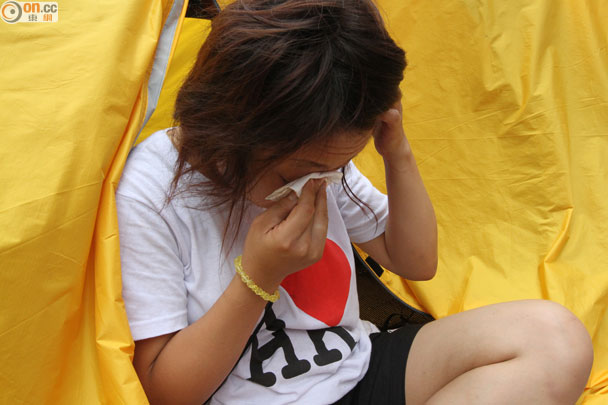
(Oriental
Daily) October 31, 2014.
25-year-old single mother Yan
How Yee was a part-time restaurant waitress. Since last September 30, she has
abandoned her family and her work to become an Occupier. She quarrels with
anti-Occupy people almost every day, she has been taken down to the police
station and she has been quite noticeable. Her father has come down to Mong
Kok numerous times to persuade to return home, but she refused. At 7pm on the
day before yesterday, her father came again and argued in the street until the
daughter fled. The father left angrily.
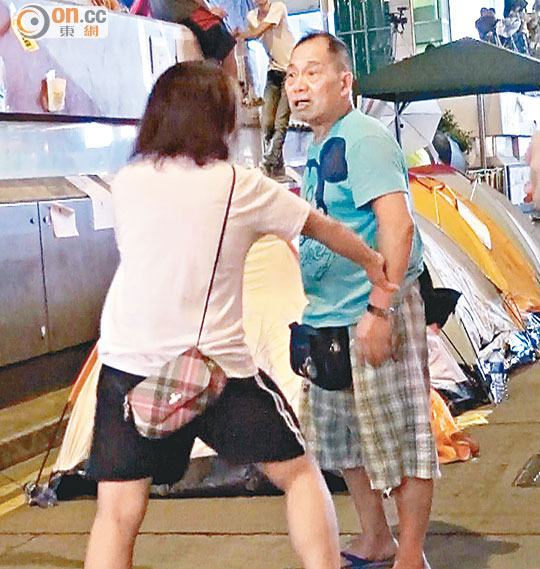
Daughter and father quarrel in the street
Yan How Yee reflected: "I must first say
'Sorry' to my father, my mother and my elder brother. I stay here all night
and I neglect to care for my son. I cause my family members to worry about
me. They are worried that I could be arrested. If something happens to me,
then there is no one to look after my son. I did not give birth to my son so
that he can become an orphan. I fully understand why my family is upset at
me." She said that she has found her existential value and meaning in the
Occupy Mong Kok area.
(Tai
Kung Pao) December 31, 2015.
According to the father of Yan
How Yee, when Mong Kok got occupied, she was "very scared" and refused to step
outside her home. After she saw the call to action on the Internet, she
completely changed. For the past twenty plus days of Occupy Mong Kok, "She
didn't care for her son. She didn't care for anything. I don't know what
happened."
Many Internet
users criticize her failings as a mother. "It has gotten to the point where
Occupy Central is even closer to her than her son or parents." "Occupy
Central is an evil cult." "This single parent seemed to have been recruited
into an evil cult ... she abandoned her son and family."
(Oriental
Daily) November 11, 2015.
Yan ("Occupy Mong Kok") How Yee
brought her 20-month-old son to keep watch with her at the supply station.
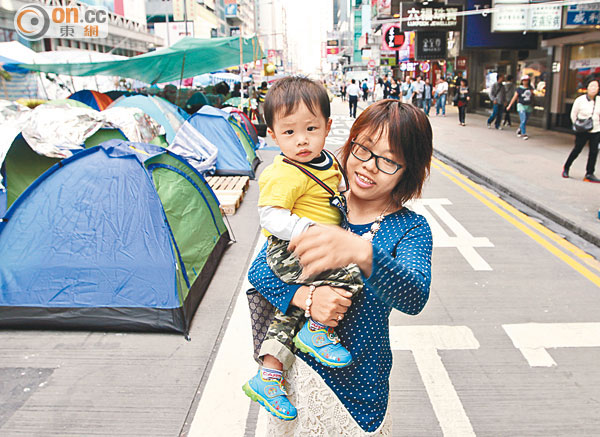
(Oriental
Daily) November 13, 2015.
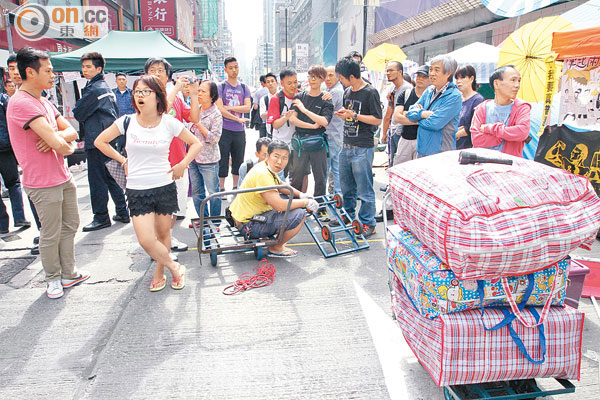
At around 11am, Yan ("Occupy Mong Kok woman")
How Yee used a handcart to remove wool blankets and other materiels from the
Nelson Street materiel station to the top of the MTR subway station
entrance. Other Occupy Mong Kok volunteers immediately pointed out that the
materiels are still needed by people, but Yan argued that the materiels may
be spoiled or destroyed during the upcoming clearance. She said excitedly:
"I am not taking it for myself!" The police had to come in to mediate.
(Oriental
Daily with video) November 15, 2015.
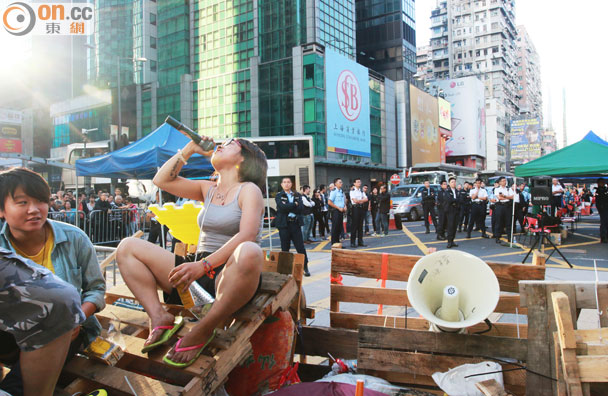
A dozen or so anti-Occupy people held a Peace
Forum at 3pm in the Occupy Mong Kok area. Shortly afterwards, they began a
shouting match with the pro-Occupy people who were about 5 meters away.
There were about 50 people on each side. The Occupy people used a megaphone
to yell obscene language. The anti-Occupy people played mainland music on
the mobile phone. So the Occupy people played Beyond's Vast Skies and
Boundless Sea on the mobile phone amplified by the megaphone. Finally,
Yan ("Occupy Mong Kok woman") How Yee grabbed the microphone and sang along.
So this forum somehow turned into a musical concert. The police watched from
afar.
(Oriental
Daily with bleeped video) November 20, 2015.
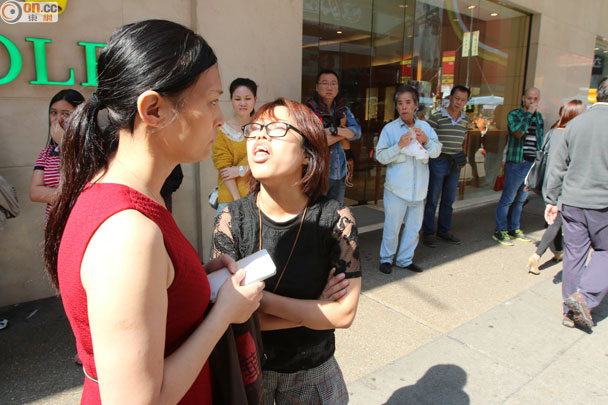
At around 11am, a female mainland tourist
walked by a scaffold on Nathan Road near Shan Tung Street, and quarreled
with construction workers over the obstruction of the pedestrian path. Yan
("Occupy Mong Kok woman") How Yee heard the commotion and rushed over to
"assist" the construction workers. She cursed out the mainlander and used a
siren against her. The female mainlander fled inside a jewelry store. Police
came over to mediate.
Video:
Phoenix TV
(Oriental
Daily with video) November 21, 2015.
Yesterday Yan ("Occupy Mong Kok
woman") How Yee declared that she was donating about 200 corkscrews used to
open red wine and beer bottles. She tossed the corkscrews on the ground and
invited pedestrians and other Occupy Mong Kong people to take them. When
asked for the reason, Yan said: "It is the Red Wine Festival time! Of course,
we have to open up red wine to celebrate!" The police came and asked
questions, but took no further action.
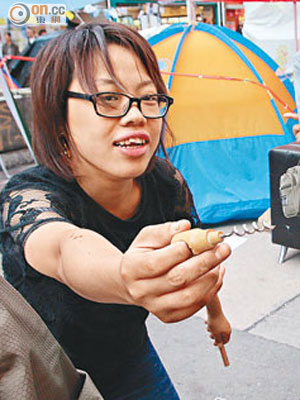
(Oriental
Daily with video) November 22, 2015.
The distribution of the
corkscrews has caused internal turmoil within the Occupy Mong Kok community.
Yesterday, some individuals took advantage of the absence of Yan How Yee and
removed more than 300 corkscrews, placed them in a black plastic bag and
discarded the bag on the street. For safety reasons, the police have removed
the bag and its contents. They asked the owner of the corkscrews to contact
them.
(Oriental
Daily with video) November 21, 2015.
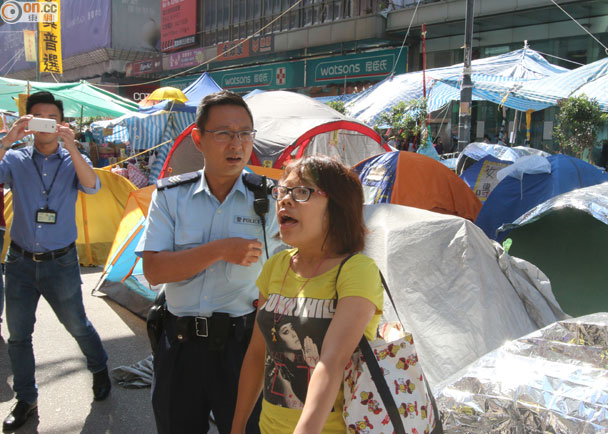
At around noon, Yan ("Occupy Mong Kok woman")
How Yee returned to her materiel station outside Bank Centre and found it
ransacked, with one sofa and other materials missing. There were cigarette
butts and empty beer cans on the ground. The police were summoned. According
to Yan How Yee, she was booed yesterday by a group of Occupy Mong Kok
persons after she handed out wine-bottle corkscrews and so she went home to
rest. When she returned, this was what she found. She also said that there
were eyewitnesses to the process. She asked the police to send in the
Organized Crime and Triad Bureau to investigate.
Yan How Yee told the reporters that she felt
being targeted and therefore she has decided to withdraw from the Occupy
Mong Kok movement effective immediately.
(Oriental
Daily) November 22, 2015.
There was a primary school boy
who ran away from home. At first, he slept under the Hung Hom overpass. Then
he drifted over to Mong Kok because he can find food and shelter there. Thus,
he became a member of Occupy Mong Kok. During this period, he was taken by a
man to stay over in an apartment. When the anxious family members located him
in the Occupy Mong Kok area, they learned that he was touched in the genitals
twice. The police arrested a suspect who works for a gay volunteer group.
This case of sexual molestation explains at
least two issues. Firstly, the Occupy areas have provided perfect
food-and-shelter for homeless people. For those who want to skip school,
work or family, this is paradise with magnetic attractions. Secondly, the
Occupy area is perfect for those with ulterior motives, such as for
predators, drug abusers, thieves, voyeurs, rapists, pedophiles, etc.
Honestly, the Occupy Central Trio's Benny Tai
and Chan Kin-man have retreated from the frontline because they want to keep
their job. The only people who can still hold on are definitely those who
don't have to work for a living. These include Scholarism/Federation of
Students heroes who receive government subsidies and who apparently don't
have to show up for classes, do homework or take exams; opposition
politicians who get paid $90,000 a month by the government but spend their
time causing trouble; a lifeguard who fakes a work-related injury and goes
on paid medical leave from the Leisure Services Department in order to work full-time as Jimmy Lai's personal
bodyguard; the Goddess of Gambling Tsui Tsui who claimed that her entire
personal assets were stolen from her Occupy Central tent; the white-haired old lady
who gets paid to act as a human shield; ... There are all manners of modern
knaves and weirdoes.
Among these people, the well-known Yan ("Occupy Mong Kok woman") How Yee
deserves a special mention. She is a single mother with an infant son and
elderly parents. Called by the spirit of genuine universal suffrage, she
abandoned her son and her family to become the new Goddess of Democracy. But
it is incomprehensible how such an individual who gave herself to the
streets for the sake of Hong Kong's future could be targeted by other Occupy
Mong Kok denizens and forced to withdraw. This is a huge loss for the Occupy
Movement as well as the grand project of Hong Kong democracy.
(Oriental
Daily) December 28, 2015.
Several dozen Shopping
Revolutionaries gathered as usual after 10pm last night outside the Hollywood
Plaza on Sai Yeung Choi Street South (Mong Kok). A number of Blue Ribbons were
gathered there too. A large number of police officers were present to prevent
the two groups from charging onto the roadway and to maintain order.
Yan ("Occupy Mong Kok woman") How Yee claimed
to feel ill and sat down on the sidewalk, then charged onto the roadway and
refused to leave. After several minutes, Yan How Yee claimed to be ill and
the police called an ambulance to take her to the hospital.
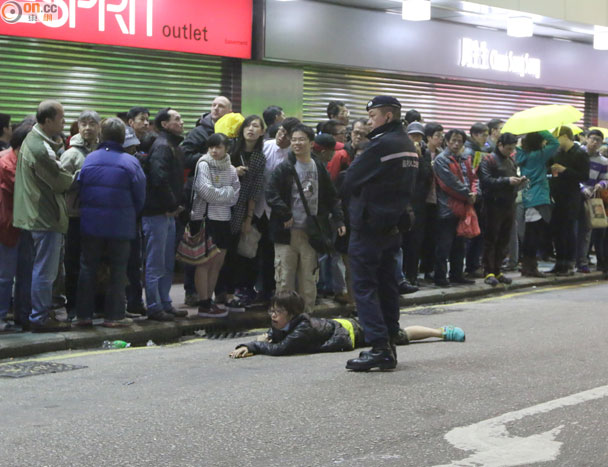
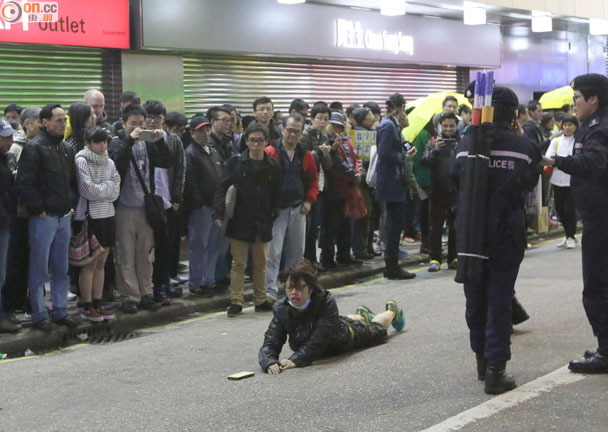
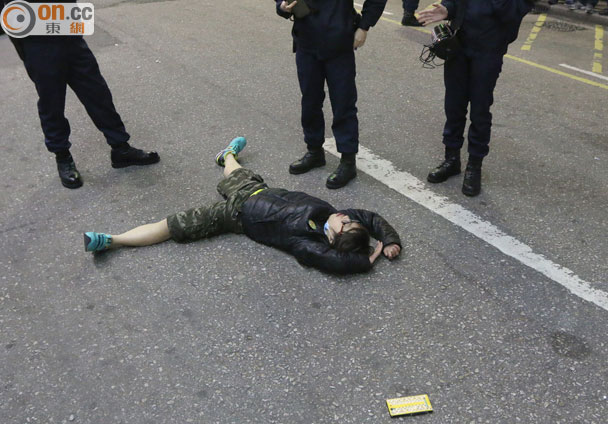
In last October 2015, Yan How Yee was reported
to be marrying soon.
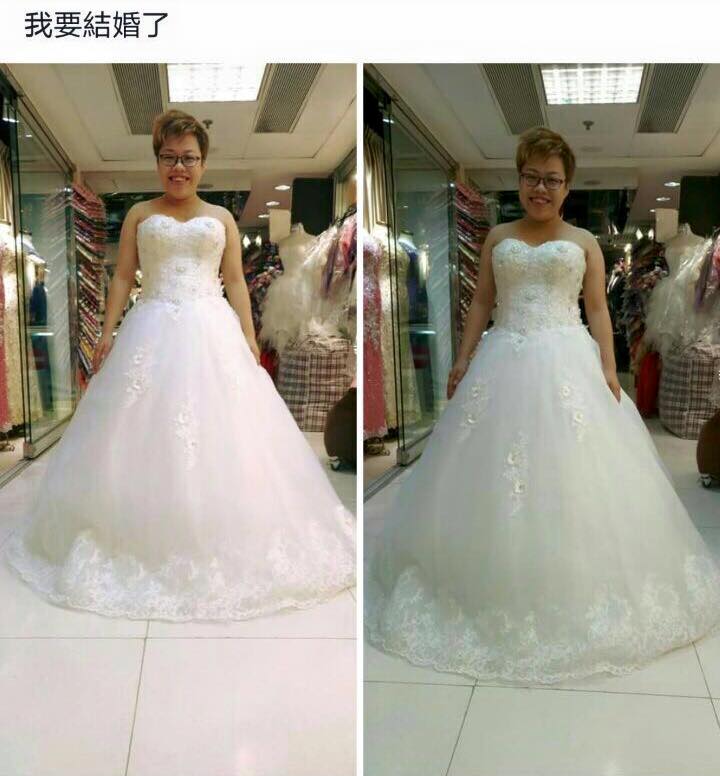

Other flashes-in-the pan with no staying power:
-
Video
of a man talking with the voices inside his head in Occupy Mong Kok
- Students doing the Zombie Jump
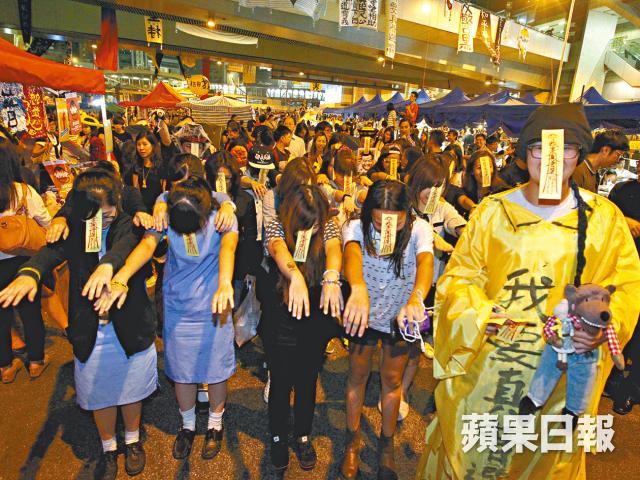
- Occupy Mong Kok fighting for genuine
universal suffrage on Nathan Road in Occupy Mong Kok zone:
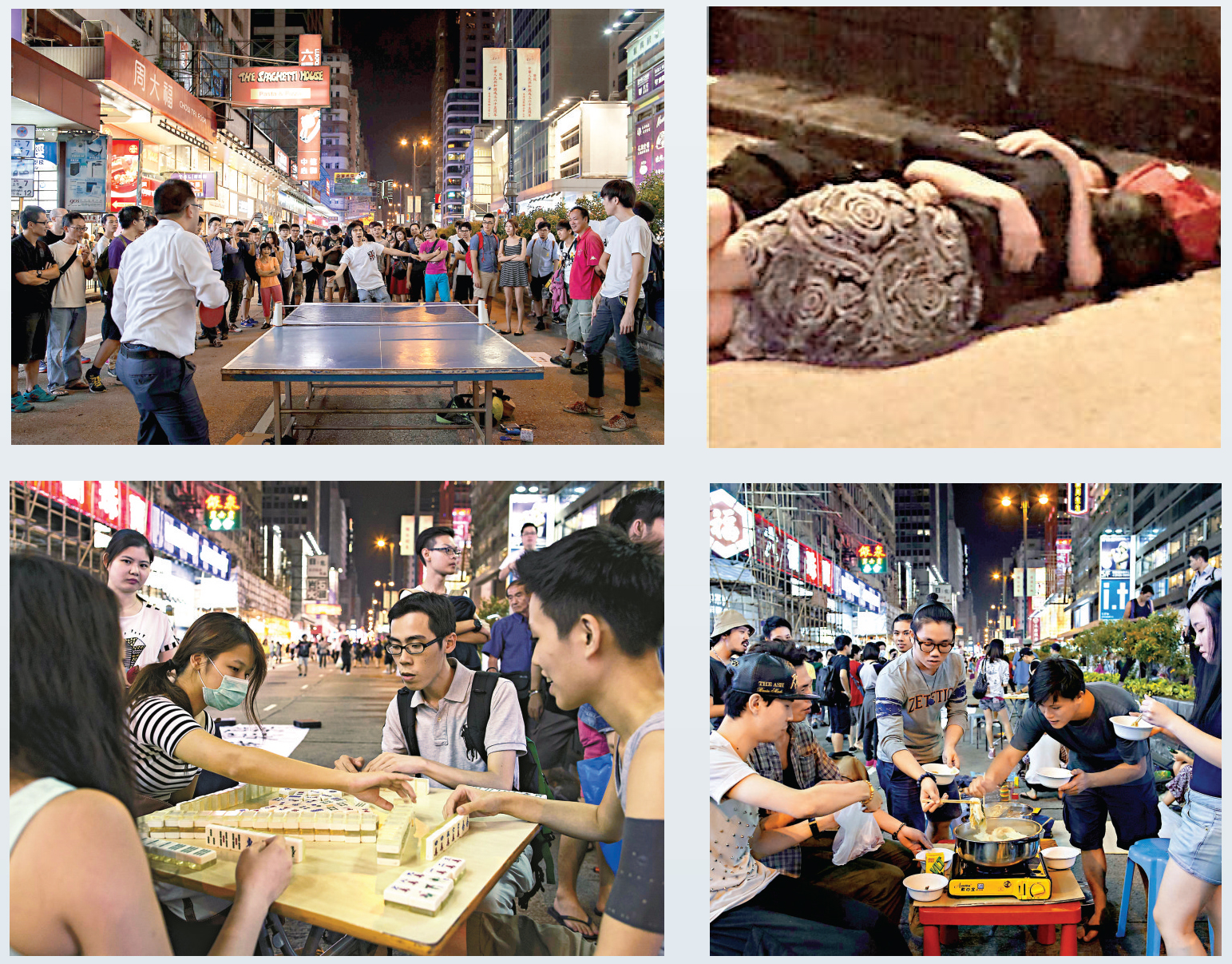
(Headline
Daily) By Chris Wat Wing-yin. October 22, 2015.
After the Umbrella riots, many demons emerged
in society. This is no exaggeration. During the year or so, we can see many
abnormal persons coming out in the many social incidents, both large and
small.
There is a mental patient who likes to go
around
naked, there are men and women who have bipolar disorder, there are drug users who don't show
their faces, there are men who wear skirts, there are pretty girls who use
foul language ...
At the Hong Kong University incident, the MTR
incident, the earlier Reclaim actions, the late-night Shopping Revolution,
these demons showed up back and forth.
The pan-democrats have never faced this issue
directly. The Yellow Umbrella soldiers become evasive about this
phenomenon. But no matter how you draw the line between you and them, these
crazy people are the by-products of the Umbrella riots. They are carbuncles
that emerge in the name of "genuine universal suffrage."
If a side condition for obtaining FREEDOM
DEMOCRACY HUMAN RIGHTS JUSTICE is to release your sickness and bestial
instincts, then the genuine/fake universal suffrage would be useless for you
because your society will become the paradise for mental patients. This is
what Hong Kong today is like ...
(Oriental
Daily) September 16, 2015.
September 28 will be the
anniversary of Occupy Central. So far, there is no indication of any
commemorative activity within the pan-democratic camp, nor any sign of
re-Occupy. So far, only Scholarism and the Federation of Students appear to be
holding a large symposium which the pan-democratic legislators and other civil
groups are not participating. Could it be that the approaching District
Council elections is causing the pan-democrats to separate themselves from
Occupy Central and other post-Umbrella groups? And those who are still facing
charges of illegal activities during Occupy Central now have to be on their
best behavior?
The Civil
Human Rights Front met with Scholarism/Federation of Students on September
15. They said that many civil groups are interested in holding commemorative
events which the Civil Human Rights Front will plan and publicize. However,
there is no consensus yet on the specific activities. Scholarism/Federation
of Students want to hold a series of civil lectures by university professors
mainly on the class boycotts, civil society, etc. However, they don't have
any concrete plans on the day of September 28th.
(HKG
Pao) September 19, 2015. (Wen
Wei Po) September 18, 2015.
On September 12 (Saturday) at
the regular Shopping Revolution on Sai Yeung Choi Street South (Mong Kok), Tam
Tak-chi (People Power) got on a ladder and used a megaphone to announce to the
people that he wants to start the action of "Do not forget our original
intentions, return to Admiralty" on September 28th. At 5:58pm this coming
September 28, I call for 1,000 persons to walk out onto Gloucester Road
(Admiralty) and sit down for 87 minutes." The 87 minutes is in reference to
the 87 tear gas canisters fired by the Hong Kong Police last year on September
28th.
Tam Tak-chi also
pointed out that his statement may be guilty of "incitement of unlawful
assembly." Tam promised to the supporters: "If you only sit down on the
ground, the police can't beat you up because they don't have cause. They can
only carry you off one at a time."
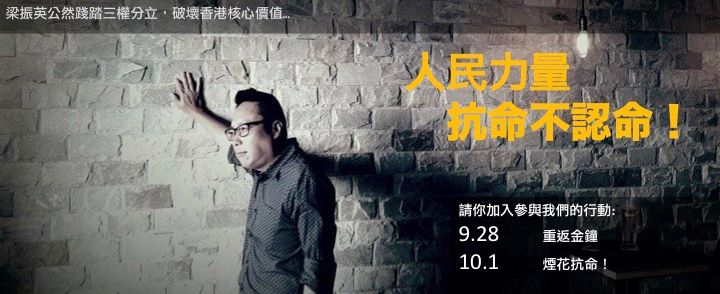
On the Facebook of Tam Tak-chi (People Power),
he has a promotional poster: "People Power, resist, never give up! Please
join our actions: 9.28 return to Admiralty; 10.1 fireworks resistance!"
For most of the political parties interested
in the District Council elections, Occupy Central is a loser of a cause.
Therefore they couldn't stay far away enough from any September 28
commemorative activity. People Power has only one incumbent district
councilor. In each district, one and only one councilor is elected based
upon the highest number of votes. Therefore People Power does not have any
realistic chance of winner any district council seats. Tam Tak-chi is only
interested in getting name recognition for himself in preparation for next
year's Legislative Council which is based upon proportionate representation
(for example, the top six vote-getters in Kowloon West will get Legco seats)
so that it is possible to get in with less than 10% of the votes.
Video:
https://www.youtube.com/watch?v=eAoPL-8gd1A September 18 Tam Tak-chi on
Sai Yeung Choi Street South (Mong Kok)
(Oriental
Daily) September 20, 2015.
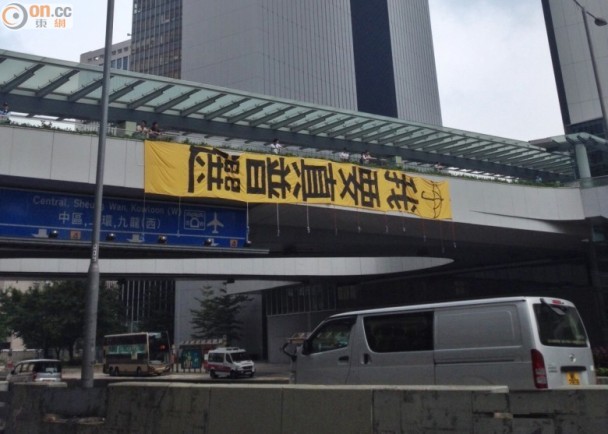
At around 10am, the police received a report
about a banner on the pedestrian overpass from Harcourt Road to Government
Headquarters. They got there and found a 15 meters by 2 meters yellow banner
with the words "I want genuine universal suffrage" with many water bottles
dangling from the bottom. The police determined that the banner posed an
immediate danger to car drivers (i.e. the banner or the bottles may fall
down onto passing vehicles below). Therefore, the banner was removed.
Internet comments:
- The vertical banner was
horizontally place, so that you have to turn your head 90 degrees to read the
words. This means that this was leftover originally intended to be hung from a
tall spot (e.g. Lion Rock), but now someone is emptying the warehouse after it
sat there unused for months.
- Well, its use consists of hanging there for a couple of hours and then
removed, kept for a while in a warehouse and destroyed ultimately when no one shows up to
claim (=admit to an illegal act).
- In
Cantonese, "to speak sideways" means "to have your say carry the day by
force against all reasoning." That's about right here.
- In Cantonese, "to sleep
sideways" means "to be dead." That's about right here too, because "genuine
universal suffrage" is now dead and we are stuck with electing the Chief
Executive by a 1,200-person Election Committee for the foreseeable future.
- The banner indeed commemorates Occupy
Central. It reminds us that the entire Occupy Central episode was completely
fruitless with nothing whatsoever accomplished. Of course, they say that
there had been a civil awakening among young people. That is just selfish
and narcissistic, just like hanging these banners. They serve no purpose
other than make those involved feel good about themselves.
- Thanks to these clowns, we didn't get any
universal suffrage, genuine or otherwise. Instead we got exactly the same
1,200-person election committee just as before for the foreseeable future.
- Hey, I have a better banner for them:
"Dead chicken trying to kick off the pot lid #ChickenMovement" The image is that of a
cooked chicken still trying to kick off the pot lid and hoping to live. This
saying is used to refer to people who are still in denial even when the
game is over already.
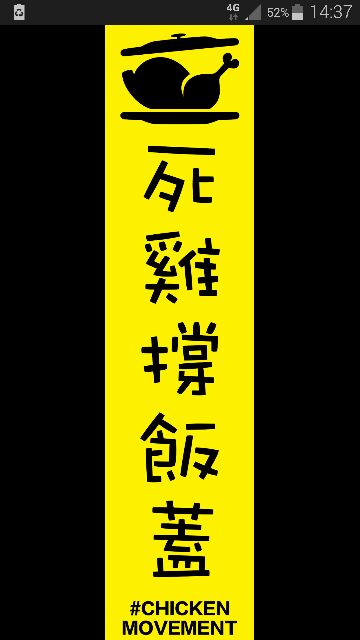
(Ming
Pao) September 27, 2015.
The Civil Human Rights Front
made clear at its press conference today that there is no plan to stay around
after the commemorative activities. They said that they will have several
dozen marshals on duty to maintain order. On September 28, the Blue Ribbons
will be in Tamar Park while the Yellow Ribbons will be at the Legislative
Council and Lennon Wall.
When the Civil Human Rights Front held their meeting, they did not discuss
the possibility that someone might dash onto the road. Even if People
Power's Tam Tak-chi called for such action, the response seems cool. This
means that the likelihood is low. But if someone should attempt that, the
Civil Human Rights Front won't be able to stop them. However, they can
disown the action and dissociate themselves from the perpetrators.
An Umbrella Soldier (someone from the Umbrella
Movement planning to run in the elections) told us: "There is a high risk of
conflict, because the crowd is in its largest size." If there should be
clashes, people will be reminded of their fear of the Occupy Central and
thus impact their election chances.
In addition, Cyd Ho said that the
pan-democrats will not take charge of the 9.28 activities, because their
role in last year's Occupy Movement was merely supplementary. Some civil
groups are critical of the pan-democrats for this attitude. But one
pan-democrat sighed and wished that the civil groups would sympathize with
the fact that the all-important district elections are coming up, and there
should be a division of labor whereby the civil groups organize the
activities while the pan-democrats concentrate on the district elections.
This pan-democrat says that all the pan-democratic legislators will be
present on September 28.
Internet comments:
- Why is Occupy Central a loser
of a cause in winner-take-all elections? Tam Tak-chi posed this question on
his Facebook:
Remember the four demands of the
students?
(1) Civil
nomination of the Chief Executive/elimination of the functional
constituencies in the Legislative Council
(2) Rescinding the August 31st resolution of the National People's
Congress Standing Committee
(3) Resignation of Chief Executive CY Leung, and the political reform trio
of Carrie Lam, Rimsky Yuen and Raymond Tam
(4) Open Civic Plaza to the public
I won't blame you if you should think: "What
is the fucking use? None of these demands were realized." But I point out
that would be because you are callous and indifferent in shoving your own
responsibility lightly onto others. Such is the tragedy of our era.
Well, everybody knows that the
four demands got nowhere. That is a fact. The first question is: Why? There
are many possible answers. First and foremost, the Occupy Central principals
were nincompoops. Second choice is the method which inflicts hurt on common
folks without affecting the governments. In any case, what people want is a
realistic assessment of what went wrong, what to avoid and what alternatives
can be used in the future. People do not want the same nincompoops to repeat
the same method and accomplish nothing again while accumulating even more ill
will. The pan-democrats don't want to be identified as the nincompoops in
charge of a failed method. Here, Tam Tak-chi says that he will go where no one
else dares to go by repeating the same miserable failure.
- At least Tam Tak-chi has tacitly
acknowledged that a long-term Occupy is no longer possible today. He can
Occupy for 87 minutes, but not for 87 days. Long-term Occupy is only good at
building public resentment while accomplishing nothing. Short-term (=87
minutes) Occupy can generate good media coverage for an aspiring radical
politician such as Tam Tak-chi while accomplishing nothing else.
- Incitement of and participation in unlawful assembly may lead to a jail
term of 3 months or more, which excludes the miscreant from running for
Legislative Council. Therefore, Tam Tak-chi will word his incitement
speeches carefully and watch from the sidewalk while the fools who listened
to him get arrested.
-
Here is an invitation to the 300th day banquet for the Shopping Revolution,
meeting as usual at 8pm, September 19, 2015 outside Broadway Cinema, Sai
Yeung Choi Street South, Mong Kok. The Shopping Revolution is a
very-short-term Occupy, inheriting the characteristic of building public
resentment and accomplishing nothing.
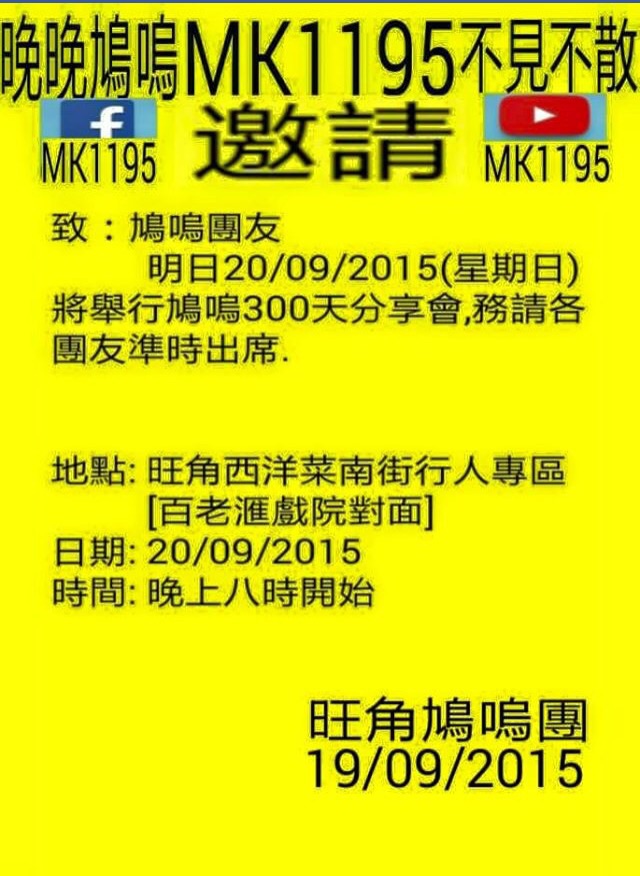
The event promoters called it off without much ado "because there were too
many police." At the time, they were harassing the Chiu Luen Minibuses.
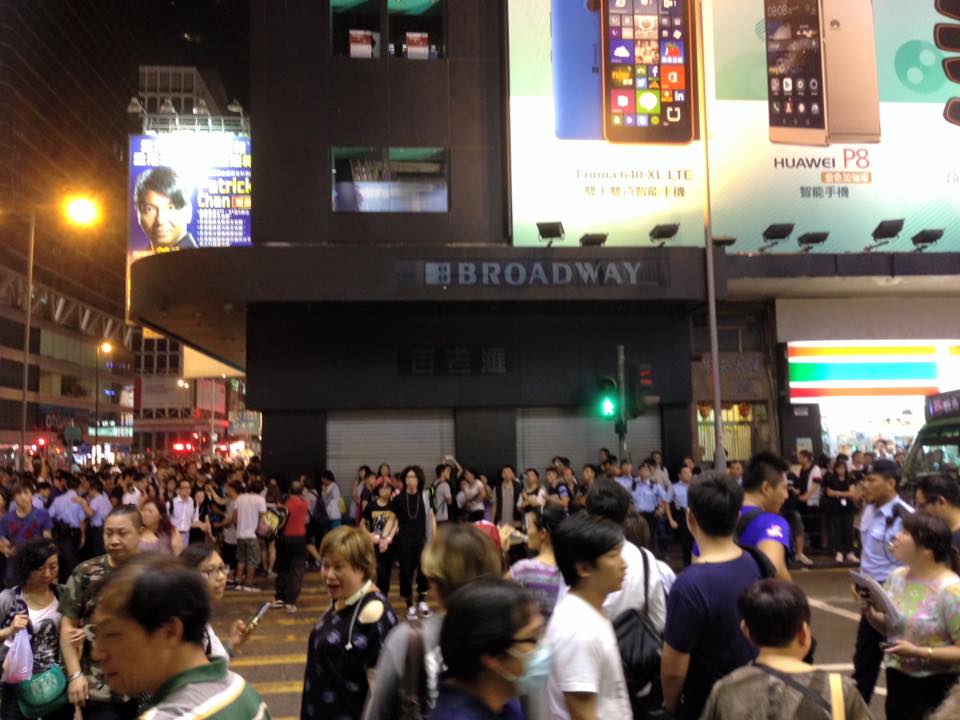
Video:
https://www.youtube.com/watch?v=Eqg4zWbUBH8
- A number of Blue Ribbon groups
have filed an application for a no-objection from the police to march on
September 28 from Chater Garden to Government Headquarters from 2:30pm to
6:00pm. They said: "If we don't take up this space for this time period, the
Yellow Ribbons may Occupy it again and then September 28 becomes the totem
pole for continual chaos in Hong Kong; so let us block their evil plot!"
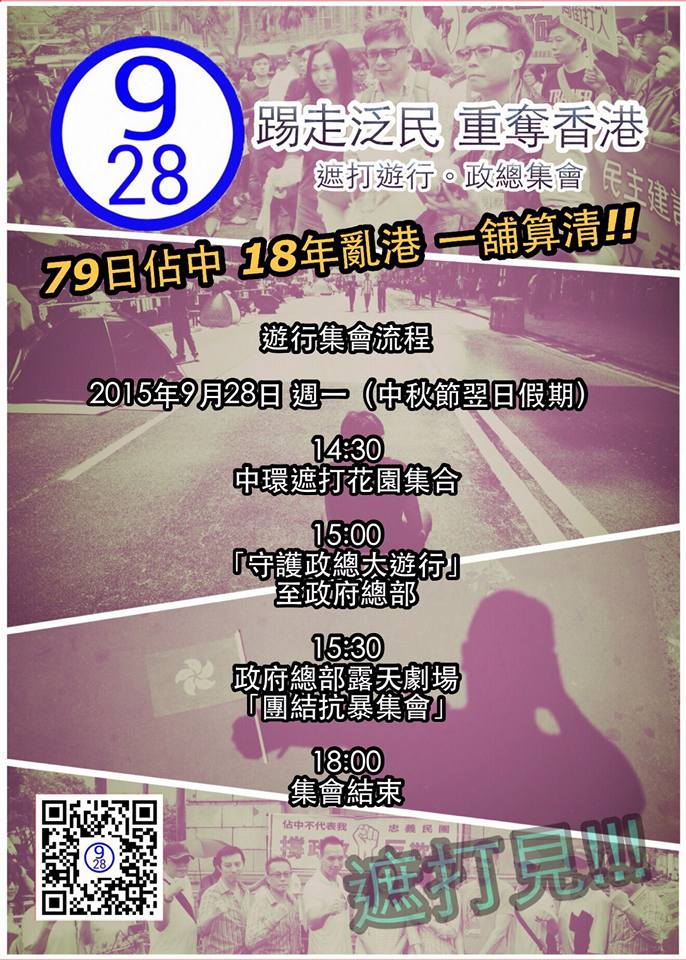
(EJInsight)
When a young man confronted Joshua Wong on an MTR train. September 16, 2015.
If he was just aiming for some fresh
attention from the online community, Lau Chun-hin has succeeded in his
mission, even though he wouldnÆt be totally happy about the viewer response.
The 19-year-old online video enthusiast, who uses the nick name Lau Ma-che,
uploaded a new clip on his Facebook page Tuesday, showing a chance encounter
with student activist Joshua Wong on an MTR train.
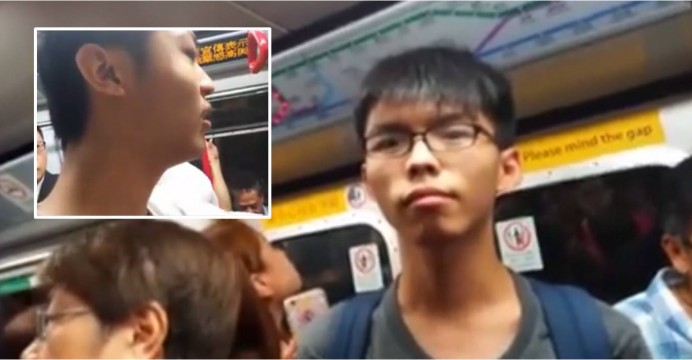
In the video which has gone viral, Lau
confronts Wong in a packed rail compartment and asks him how feels about his
actions during last yearÆs Occupy Movement. Does he not regret that peopleÆs
daily lives were affected due to the street blockades, the student activist
is asked, among other questions. When Wong doesnÆt respond, Lau says he
would take it as a signal that Wong is accepting the blame.
Another topic raised was the allegation
that WongÆs actions were influenced by some foreign forces. Wong remains
silent but tells Lau to put away his mobile phone and stop filming. Lau
doesnÆt heed the request, opting to continue the video interrogation.
Now some fellow passengers get annoyed and
tell Lau to stop his activities. ôYou are disturbing me. Can you keep
quiet?ö one man says, while another complains that Wong is causing
obstruction on the train.
Lau later posted the video online, saying
he felt threatened by some passengers. He claimed that he came across Wong
by accident on the train and seized the chance to ask him some questions
about the Occupy protests.
Wong later posted his own message online,
saying that he chose not to respond to the questioner on the train as he
believed it was the best thing to do under the circumstance. If had made any
comments, it would have only excited Lau further, Wong wrote, suggesting
that Lau was merely seeking some attention.
Meanwhile, several netizens have slammed
Lau for his conduct, describing his actions as stupid among other things,
Apple Daily reported.
According to some details that emerged on
Lau, he was asked to join a reform center in 2013 after he admitted making
an online video in which threatened a probation officer. It is also said
that he had been sent to a psychiatric hospital five times. Lau does not
belong to any anti-Occupy groups. In fact, he posted last year a picture of
himself holding a yellow umbrella at an Occupy site. He said in a previous
interview that he intends to create a buzz on the internet in order to draw
in more viewers for his videos.
(SCMP)
Moment YouTuber confronts Hong Kong Occupy Central leader Joshua Wong on
packed MTR train (and angry passengers tell him to stop). September 16, 2015.
A video showing a teenage YouTuber
confronting Scholarism leader Joshua Wong Chi-fung in a busy MTR train
compartment û and then be greeted by curses and swears from other passengers
û has gone viral. The five-minute clip was filmed by 19-year-old Lau Chun-hin,
known online û where his videos typically attract several thousand views û
by his nickname ôLau Ma Cheö.
The film begins with Lau slipping through a
crowd of passengers in a packed MTR compartment to reach Wong after
apparently spotting him by chance. Lau demands the student leader explain
how he feels about last yearÆs Occupy Central protests, saying Wong did not
respect Hongkongers.
When Wong asks Lau to stop filming, saying
he was causing a disturbance to other passengers, Lau continues: ôOh, now
you are afraid of obstructing others. So when you occupied Mong Kok and
Central û at that time you were not obstructing others?ö ôIf you think you
were disturbing others at that time, why you did things to hurt others? Did
you receive any advantage?ö Lau questions the 18-year-old student activist.
Wong keeps nodding his head but remains
silent. Lau then says: ôI have wanted to speak for Hongkongers for a long
time. I donÆt care how high your moral values are. I feel that when you hurt
others, affect others, then you are wrong.ö
An angry male passenger joins the
conversation at this point, telling Lau: ôSo how about you now? You are now
filming us. Which station do you want to get off?ö ôYou are disturbing me.
Can you be quiet?ö the man says. Another male passenger complains that Lau
is obstructing him: ôYou take all the space here. What are you doing here?
All of us have to give way to you.ö As the first man gets off the train, a
third man approaches to confront Lau with swear words. ôAre you taking a
picture of me? If my photo is put onto the internet I will hunt you down,ö
he warns.
LauÆs film has been viewed almost 160,000
times on YouTube since being uploaded yesterday. While it has earned fewer
than 1,000 ôlikesö, more than 5,000 users have given him the thumbs down.
Some YouTube users described LauÆs video as
a ôstupidö, ôpointlessö work in which he only aimed to seek attention. They
also said Lau had breached MTR by-laws by causing a nuisance to other
passengers. ôSuch a moron. The questions asked are all stupid,ö said user
Cheuk yinh Yeung. ôStupid Lau Ma Che. I used to support you ... But this
time you are just too stupid,ö another called lun xo said.
Lau was ordered by a court to attend a
reform centre in 2013 after he admitted making an online video in which he
threatened a probation officer. This took place while he was serving a
probation term for making another video in which he intimidated a girl. Lau
told the court at the time he wanted to develop a career in the
entertainment industry.
(YouTube)
Lau Ma-che versus Joshua Wong + Foul-mouthed uncles. The whole world is
shocked!
0:10 (Male voice) Wong Chi-fung.
Where is Wong Chi-fung?
0:25 (Lau) Mr. Wong Chi-fung, can you tell us about how you feel about
Occupy Central? Mr. Wong Chi-fung, I am ...
0:29 (Wong) Can you put your phone down?
0:32 (Lau) I want to interview you about how you feel about Occupy Central?
0:36 (Male voice) Hey, there are senior citizens here. Do you know? Can
you shut your phone off?
0:39 (Lau) Because I feel that you really don't respect the people of Hong
Kong. That is, if you don't respect people, there is no possibility to
expect them to respect you back. I think that your actions during Occupy
Central affected the livelihoods of the people of Hong Kong. The lives of
old ladies. They can't get any peace and quiet at night. Here I want to see
if you have any explanations.
1:01 (Wong) I don't want to say anything in the MTR car. There are other
citizens around ... everybody is ...
1:03 (Lau) So now you are worried about interfering with other citizens. But
back then when you occupied Mong Kong by force, you occupied Central by
force, that was not interfering with citizens? That is, a lot of commutation
... you affected other people in going to school, going to work ... they
were affected a great deal. Why do you think that people are affected at
this moment? If this moment is affecting people, why back then did you so
many things that hurt others? Did you get any benefits? Can you tell us? You
won't respond? A silent admission? Yes, that was a silent admission. I have
always wanted to ask you. Today I came across you here. I want to ask you
why you did those things. I don't care how noble your ideas were, or what
your demands on Hong Kong are. I feel that you hurt people, you affected
people and that is wrong.
1:56 (Male voice from unseen speaker) What about you now? You are affecting
us. Do you know? Where do you want to get off? Where do you want to get off?
2:00 (Lau) Get off?
2:00 (Male voice) Which stop? You are affecting me. Do you know?
2:05 (Lau) Millions of people in Hong Kong were affected.
2:06 (Male voice) Why don't you get off the train and talk? Where are you
getting off?
2:10 (Lau) We get off, we get off.
2:12 (Male voice) When are you getting off?
2:13 (Lau) Getting off right now.
2:21 (Male voice) When you take your photos, you better not take a photo of
me.
2:21 (Lau) I won't take your photo.
2:22 (Male voice) You are acting as if you are high and noble, buddy.
2:27 (Lau) I am not pretending to be high and noble.
2:24 (Male voice) You are taking photos.
2:25 (Lau) Is that not allowed?
2:27 (Male voice) Yes, that is not allowed. What do you want to do? What do
you want to do?
2:34 (Lau) Call the police.
2:35 (Male voice) Call the police! That's even better. Development zone. You
are affecting me. Do you know? You are affecting me. Can you shut up,
alright? If you want to express yourself, get off the car and express
yourself. Do you know? You are affecting people.
2:45 (Lau) Yes, yes.
2:49 (Male voice) Kid, please make way. I am getting off.
2:58 (Male voice) The two of you should get off the train and discuss at
your leisure. You should take him with you and discuss at your leisure.
3:00 (Lau) He won't get off with me.
3:01 (Male voice) You get off. He'll get off together with you. You can call
the police. You can do whatever you want. Do you know? You say that people
were affected. You are affecting us. Do you know? Make way. We are getting
off.
3:12 (Lau) We are getting off.
3:13 (Male voice) Move over a bit.
3:14 (Lau) There is no need to be so rough.
3:16 (Male voice) Not being rough. Just deliberately talking louder.
3:16 (Lau) Is that so?
3:18 (Male voice) Yes.
3:19 (Lau) Speaking loudly is rude, right?
3:21 (Male voice) Whatever you say.
3:24 (Male voice) I think that you are somewhat cockeyed. Is that right?
3:25 (Lau) Yes. I am cockeyed.
3:27 (Male voice) I can see that.
3:28 (Male voice) Feeble-minded.
3:29 (Male voice) No, don't say that about people. You are making something
out of nothing.
3:32 (Male voice) You have read a lot of books.
3:34 (Male voice) But the brain has gone to rot.
3:37 (Lau) Hong Kong has a lot of such people who are making things so bad
in Hong Kong.
3:40 (Male voice) You film at your leisure, fool! (exits)
3:46 (Man in black t-shirt approaching while pointing his finger) You took
my photo!
3:47 (Lau) When did I take a photo of you? I didn't take a photo of you.
What do you want?
3:48 (Man in black t-shirt ) Huh!
3:49 (Lau) I didn't film you. You call the police.
3:52 (Man in black t-shirt ) Call what the police for what? Show me your
camera.
3:53 (Lau) You call the police.
3:52 (Man in black t-shirt ) You took a photo of me.
3:54 (Lau) I'll call the police.
3:56 (Man in black t-shirt ) You call the police immediately.
3:58 (Lau) What do you want? You tell me.
3:59 (Man in black t-shirt ) I ask you if you took a photo of me.
4:01 (Lau) I didn't take a photo of you. You are not qualified to appear on
my video.
4:03 (Man in black t-shirt ) I fuck your mother!
4:06 (Lau) Please come over. Will the citizens help by calling the police?
You are threatening me.
4:17 (Man in black t-shirt ) What is your family name?
4:18 (Lau) My family name is Lau.
4:19 (Man in black t-shirt) Fuck your mother! This is fucking giving your
ancestors a bad name!
4:22 (Lau) How is this affecting my ancestors? You are giving all the
Chinese people a bad name.
4:28 (Man in black t-shirt) Fucking what Chinese?
4:29 (Lau) You are not Chinese?
4:32 (Man in black t-shirt) I ask you, Fucking what Chinese?
4:33 (Lau) Are you Chinese? That's all you have to say.
4:34 (Lau) I am calling the police now.
4:36 (Man in black t-shirt) Please call the police.
4:37 (Lau) Many people have taken videos. You are threatening me.
4:39 (Man in black-t-shirt) Are you stupid? Don't fucking go outside then.
Beat you up?
4:45 (Lau) I'm so fucking scared. (smiles)
4:50 (Lau) You come up nearer and I'll call the police.
4:54 (Man in black t-shirt) You are fucking crazy.
4:55 (Lau) Yes, I'm fucking crazy. You're most normal.
Internet comments:
- This video has caught me in a dilemma. If
I share it, it would be giving publicity to this Horse Carriage dickhead. If I don't share
it, it would be tolerating and abetting this Yellow Ribbon Zombie bastard. This dickhead/bastard
is such a fucking nuisance.
- This was an ambush setup. Previously, Lau
Ma-che had posted onto YouTube his anti-Yellow Ribbon sentiments. In the
Joshua Wong encounter, Wong was already on the train when Lau entered with
the camera running. He had to know that Wong would be in that particular
subway car at that moment. So someone was following Wong and telling Lau how
to make the intercept.
Of course, this was just the sort of thing
that Joshua Wong would do to ambush government officials (see, for example,
#215), using
information most likely provided by the Apple Daily news team.
- Public figures can be harassed anywhere
in Hong Kong, because of FREEDOM DEMOCRACY HUMAN RIGHTS UNIVERSAL SUFFRAGE
RULE OF LAW. For more examples, see #021.
As Voltaire said, "I do not agree with what you have to say, but I'll defend
to the death your right to harass people in public places." Joshua Wong has
done so any number of times before already. He could have given Lau Ma Che some
tips about how to do this better (e.g. not be distracted by the uncle).
- In this ambush, the question was "I think
that your actions during Occupy Central affected the livelihoods of the
people of Hong Kong. The lives of old ladies. They can't get any peace and
quiet at night. Here I want to see if you have any explanations." This
is a question that many people may want to ask, but only because they
thought that the answer should be that it was wrong.
By now, it should be clear that Joshua Wong
already has his own answer down pat. "In fighting for universal suffrage, it
is unfortunate that some people had to suffer some minor inconveniences.
However, such sacrifices are necessary because Hong Kong will be a lot
better off in the long run. It is true that we accomplished zero results
with respect to constitutional reform. But the sacrifices were worthwhile,
because the Umbrella Revolution has proven to the Moment of Enlightenment
for the young people of Hong Kong."
- A harder question for Joshua Wong would
be: "Why did you tell the students to assault Government Headquarters on
December 1 2014, while you sat in the Legco Building watching live television and
eating instant noodles?"
- The newspapers do not convey the depths
to which Lau Ma-che (=The Horse Carriage) has plunged into. Ma-che is a
famous YouTube person who has run through numerous user names because he
keeps getting banned for various policy violations. Here are some favorites:
In 2012, he uploaded a video of himself
wielding a chopper while naked. He claimed to have thrust the chopper up
his anus, although the video does not show this detail.


Here is a video of him using a shoe to
clobber himself in the head:

Here is a video of him issuing a threat
to another Internet user named Shek Chi-heng:
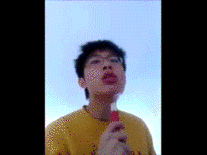
- Post-race
YouTube report from Lau Ma-che. At 1:50, Lau said: "I apologize to
all those people who were on the MTR subway that day as well as all those
who watched the video. I want to say sorry, because it is very disrespectful
to film people in that manner. It was affecting people. But why did I apply
this method to Joshua Wong? I want to apply the Joshua Wong-method to the
shit-eating dog Joshua Wong. He makes mistakes but he would never admit
them. Fuck your mother! I am imitating you now! You say that you don't want
to affect people. You eat shit! How many Hong Kong people did you affect
back then? Today you say that you are worried about affecting old ladies on
the subway? Nobody believes what you say ... "
- Post-race Facebook post from Joshua Wong:
"With respect to people like these, I think that it is better to keep your
cool. The greater your response, the more he will harass you, because such
people are attention-seeking. Here I wonder whether any Blue Ribbon websites
(such as SpeakoutHK or NewsHK) will 'report' this story (which I think has
no news value) and then spin along the line of "Joshua Wong is like a rat
scurrying across the street chased by everybody, ha ha!"? It is quite
pathetic if the pro-establishment media could stoop so low as to get a
mental patient Lau Ma Che to attack a student with dissident views."
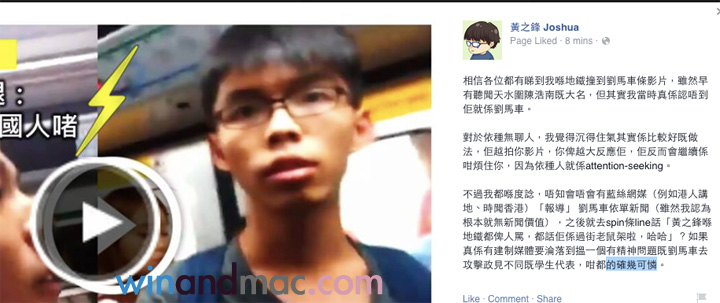
- When the guy is standing in front of you, you cower speechlessly. When you
get home, you use Facebook to call the guy mentally disturbed. Isn't that
the definition of a
coward?
- I am curious about the man in the black
Harley-Davidson t-shirt. He looks more like a bodyguard for Joshua Wong. Who
is paying him to do that? Let's see if he is present the next time that
Joshua Wong makes a public appearance.
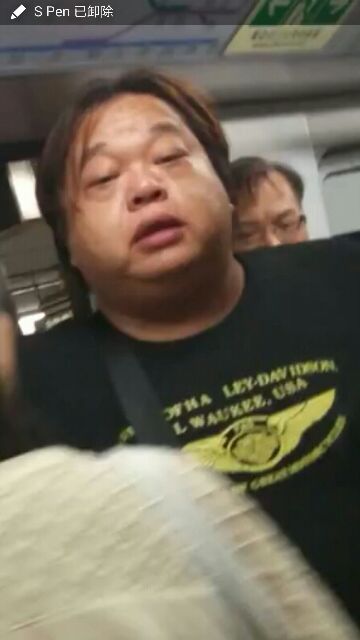
- The
follow-up video of the Lau Ma Che video has the man in the black
t-shirt fleeing from Lau and his cameraperson. With a bodyguard like this,
who needs assassins?
- So many commentators deplored Lau Ma Che
for disturbing people on the MTR train. Really? Where were you when when the
Yellow Ribbon people with V-masks were yelling on the MTR train because they
want their genuine universal suffrage?
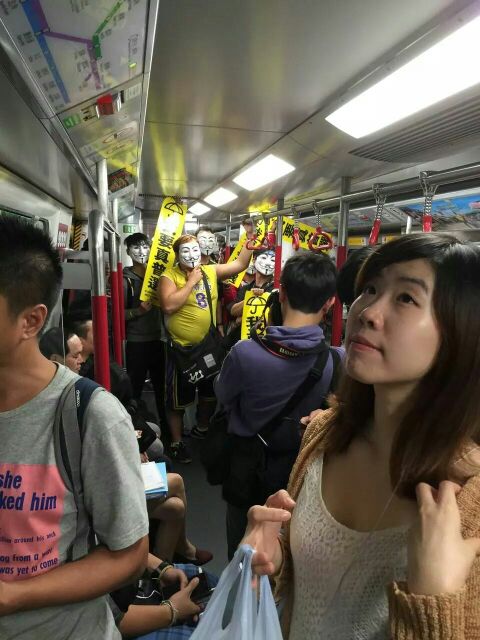
Or how about Scholarism disturbing the playing of the
National Anthem last October 1st?
- The essence of Lau Ma Che's many points is about the double standards
maintained by Joshua Wong. In the United States of Amerika, they have
iokiyar. In Hong Kong, we've got iokirayr (it's okay if you're
Yellow Ribbon).
(EJInsight)
CityU leaps in latest QS world university rankings. September 15, 2015.
Four
Hong Kong universities are among the worldÆs top 60 institutes of higher
learning, according to the latest survey by the British education company
Quacquarelli Symonds (QS). The City University of Hong Kong (CityU) made a
huge leap, jumping to the 51st place from 57th a year ago. The University of
Science and Technology ranks 28th this year, the highest in the territory,
while the Chinese University of Hong Kong is No. 51 on the list. The
University of Hong Kong (HKU) now ranks 30th this year, down from 28th place
last year.
According to QS, Hong Kong is at the heart
of Asia and is a doorstep away from mainland China. English is widely used
in the cityÆs highly internationalized universities, which is one of the
reasons why a number of local universities have made to the list, Ming Pao
Daily quoted the QS report as saying.
When
asked whether HKUÆs ranking will be affected by the recent turmoil over
academic freedom in the university, QS said the incident did not have much
effect on the ranking this year. However, instability in the internal or
political environment of a university may affect its ranking in the long
term. For example, if a number
of significant scholars are forced to leave their posts for political
reasons, that would certainly affect the ranking, QS said.
Earlier
this month Times Higher Education published an article entitled ôUnsafe
harbour? Academic freedom in Hong Kongö, which said Beijing mouthpieces in
the territory have been attacking prominent pro-democracy scholars, who are
now paying the price for ôpolitically incorrectö talk. For example, former
CityU professor Joseph Cheng Yu-shek was being called a traitor for
supporting last yearÆs Occupy protests.
Johannes Chan Man-mun, former dean at the HKU
faculty of law, was being blamed for the poor quality of research in his
department. Benny
Tai Yiu-ting, one of the three convenors of the Occupy Central movement, is
an associate professor in the faculty.
(SCMP)
Top of the class! Hong Kong University of Science and Technology rated city's
number one in latest world rankings. September 15, 2015.
The Hong Kong University of Science and
Technology has ranked top among the cityÆs tertiary institutions, according
to the latest QS World University Rankings.
HKUST, which jumped from 40th last year to
28th this year, beat the University of Hong Kong, at 30th this time, to
become the top institution in the city. They were the only two local
universities that made the top 50.
The city is on a par with its regional
rivals û Singapore, Japan and South Korea û which also have two top-50
institutions.
The QS World University Rankings, which
have been setting league tables for universities worldwide since 2005,
assess institutions through six criteria: academic reputation, employer
reputation, student-to-faculty ratio, citations per faculty, international
student ratio and international faculty ratio.
Chinese University, which was 46th last
year, was pushed out of the top 50 this time, coming in at 51st. However, it
shares a top-50 slot with HKU for academic reputation.
QS head of research Ben Sowter said the
drop for the University of Hong Kong and Chinese University was due to a
change in the way that citations per faculty were evaluated. There used to
be a historical bias towards life sciences and medicine. ôSince CUHK and HKU
both have medical schools, their results are slightly weaker than they would
have been under our previous approach,ö Sowter told the
South China Morning Post. ôThe strengths
of other Hong Kong institutions in engineering, technology and social
sciences has been more equitably recognised.ö
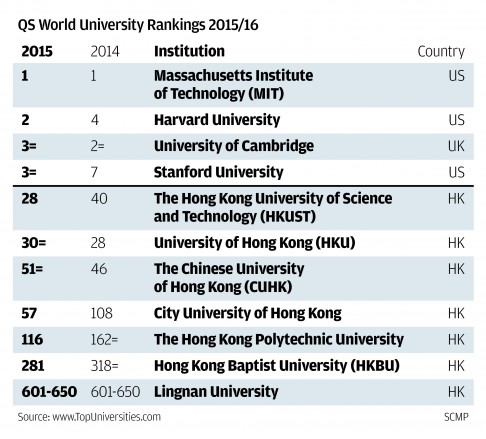
The adjustment was seen to give a fairer
evaluation to universities with a strong profile in areas producing less
research, such as the arts, humanities and social sciences. Both HKU and
CUHK had gained ground for attracting academics from other places and
remained within the top 0.25 per cent of world universities, he added.
Sowter said that Hong Kong had a lot of
strengths in tertiary education, including geographic location at the heart
of Asia, a highly international environment with a history of publishing in
English and a capability to operate effectively across disciplines.
HKUST said it was ôvery pleasedö with the
improved rankings, which it felt could always be improved. An HKU
spokesperson said the latest rankings would serve as a ôgeneral reference
for the universityö, and different university ranking systems should be
viewed with a degree of ambivalence as ranking criteria and methodologies
may vary and be revised from time to time. Chinese University noted that
various league tables used different evaluation criteria and parameters, and
thus produced different rankings. It said it continued to strive for
excellence in teaching and research.
Internet comments:
- HKUST got to the top because of its
nickname: "The University of Stress and Tension." Even mainlander students
were driven to commit suicide due to the stress and tension.
- Yet another Hong Kong University victory
to justify the path chosen by Johannes Chan, Benny Tai, Alex Chow, Yvonne
Leung, Billy Fung and the Undergrad magazine. Here is a new school logo for
them: "Tomorrow's wastrels"!
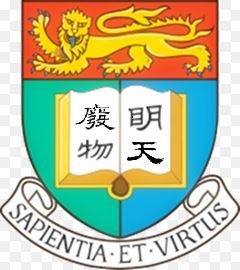
- From the movie Infernal Affairs 2: "When you join the triad, you
expect to pay for it eventually."
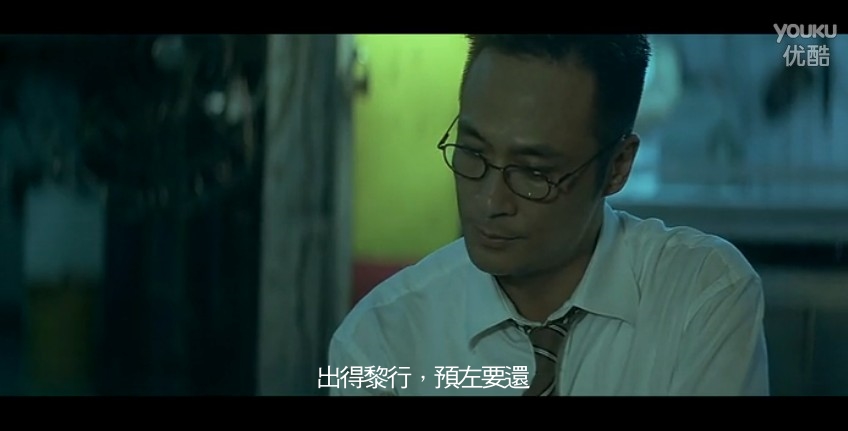
- We are glad to see that in the event of Hong Kong University sliding down
the tube into oblivion, Hong Kong can count on the University of Science and
Technology to hold its head up high.
- On the Internet forums, Hong Kong University has a nickname of Shek Tong
Tsui University. Once upon a time, Hong Kong University was simply the one
and only internationally recognized university of Hong Kong. No more now. It
is the one and only internationally and locally recognized only in the
Shek
Tong Tsui town of Hong Kong Island.
- The QS spokesperson explained that the
rankings have changed because the weight of the school of medicine was
reduced relative to engineering, technology and social sciences. UST does
not even have a school of medicine, so it got zero points from there but
nevertheless came out ahead in the overall score.
- The interesting point of comparison is
less about HKU (#28 to #30) vs UST (#40 to #28). Rather it is the two rivals in
Singapore. The National Singapore University went from #22 to #12, while the Nanyang Technological University went from #39 to #13. It is said that the
People's Action Party did well in the recent elections because it felt "a
sense of crisis" and responded accordingly. When you focus on HKU vs UST, it
means that you don't have any sense of crisis.
- Once upon a time, Hong Kong University was tops in Asia. Today, even
Tsinghua University is ahead at #25 coming up from #48.
- Ever since the handover of Hong Kong in 1997, HKU was doomed to fail
because it was forced to accept these low-quality mainland students,
including offering them generous scholarships. HKU can improve its standing
instantaneously by refusing to accept any more mainland students or
scholars, and thus maintain the self-determination/autonomy that will ensure
academic freedom.
- Go back to the historical data for HKU:
2011:#22
2012:#23
2013:#26
2014:#28
2015:#30
Do you spot the trend? Next year, HKU will be #32 or worse.
- Hong Kong University was willing to
sacrifice a temporary drop in global ranking. It was worth it, as the
courageous teachers (such as Benny Tai and Johannes Chan), staff (such as
Robert Chung) and students (such as Alex Chow, Yvonne Leung and Billy Fung)
gave up their scholarship and studies to fight for genuine universal
suffrage in Hong Kong. In the long run, Hong Kong University and all of Hong
Kong will come out ahead because of all the good things that will come out
as a result of universal suffrage.
- We have to thank the HKU folks for their valiant efforts. As a result
today, Hong Kong now has genuine universal suffrage in the form of 1,200
Election Committee members nominating and voting for our next Chief
Executive in 2017. This is the same fucking thing that we had before the HKU
folks started on their great struggle. Yes, we didn't go forwards, but they
were able to make sure that we didn't go backrwards.
- HKU may be counting on its School of
Medicine to prop its overall standing up, but not if the politicos have
their way. Recently Civic Party legislator Alan Leong has accused School of
Medicine professor Lo Chung-mau of "stopping the world from turning." Lo
Chung-mau had just successfully performed the world's first double liver
transplant. But Alan Leong wants him gone. Leong said: "I am very angry.
They are ossified, they have been left behind my times. At 60 or 70 years
old, they take pride in being 'successful' and want to impose their ways
onto young people. They lack empathy. They don't try to understand what
young people think. They only know how to criticize the method of expression
of the young people and punish them for not obeying the authorities. They
want to cling onto their social positions and they won't yield the way for
young people. Society can only continue to progress if a new generation can
replace the old generation."
- Yep, that's about right. Let's force Lo Chung-mau into retirement and let
Billy Fung do the next double liver transplant.
- (HKG
Pao) September 15, 2015.
September 28th will mark the anniversary
of Occupy Central. On September 29th, the Hong Kong University Council
will be meeting to vote on the Pro Vice Chancellor matter. According to
information, the radical political parties People Power, Civic Passion and
others will show up in large numbers to join Scholarism and the Hong Kong
Federation of Students.
Legislative councilor Ip Kin-yuen says that
Johannes Chan must be appointed Pro Vice Chancellor became he has become a
symbol of self-determination/autonomy at the university. That is to say,
Hong Kong University must be allowed to make its own decisions free of
outside interference. Therefore, several hundred masked outsiders in black
(none of whom were or are Hong Kong University students, teachers, staff
members or alumni) will show up on campus to defend that freedom and
valiantly force the University Council to vote their way. Nothing is most
absurd; things can only be more absurd.
- Hong Kong Federation of Students
secretary-general Nathan ("Law37") Law just boasted to the press that the
Federation of Students helped out in the siege of the Hong Kong University
Council members. Well, the Hong Kong University Students' Union is not a
member of the Federation of Students and Law37 is a student at Lingnan
University. This is proof of outside interference of the
autonomy/self-determination of Hong Kong University.
- (SpeakoutHK)
The tortoise has caught up. By Chris Wat Wing-yin. September 13, 2015.
In England, schools usually start in
mid-September. My daughter is a new student and has to report in earlier.
She got together with the international students to greet the new academic
year. She listened to advice and did not stick to Hongkongers. On the
first day, she made friends with a German, an African and a mainland
Chinese.
My daughter said that the mainland
Chinese student kept speaking to her in English. She thought it strange
and said in putonghua: "Actually, you can use putonghua
because I can understand it." The mainland Chinese student was surprised
and so they started speaking in Chinese.
On the second and third day, she made
more friends. The teachers deliberately mixed persons from different
nations. During meals, they did not segregate by place of origin. Oddly
enough, when mainland students encounter Hong Kong students whether to eat
or ask for directions, they still speak in English.
"I don't understand what they are
saying?" said the Hong Kong student.
"You can't understand ..." The mainland
Chinese student said.
The faces are similar, their
nationalities are similar, and they want mutual support and understanding
in an unfamiliar place. Nevertheless they speak in a foreign language.
Even more tragically, Hongkongers think
that they come from a cosmopolitan city and often make fun of the backwards
mainlanders as a hare-versus-tortoise race. But they don't even realize
now that the tortoise has caught up and passed them. My daughter said that
the mainland Chinese students basically speak better English than the Hong Kong
students do. Their pronunciation is quite proper. By contrast, our English
clearly has a Hong Kong accent. So our English is worse than theirs and we
are no good in putonghua either. We are neither east nor west. After one
week in England, my daughter's greatest reflection is: "Hongkongers are in
big trouble."
(EJinsight)
September 14, 2015.
Netizens are tearing into an outspoken
pro-Beijing columnist for calling Hong Kong people ignorant, dismissing
her as a ôsuperficial patriotö. TheyÆre accusing media veteran Chris Wat
of hypocrisy after a Sept. 11 op-ed in Sky Post in which she compared
Hongkongers to the ignorant hare in the Aesop fable.
She said Hongkongers donÆt understand
that Hong Kong and China are not rivals.
Wat cited her daughterÆs experiences in
Britain as an example of how Hongkongers and mainlanders use English to
communicate instead of a Chinese language or dialect. She said Hongkongers
speak English with a distinctive Hong Kong accent and canÆt communicate
well in Mandarin. On the other hand, mainlanders are fluent in both
Mandarin and English, she said.
Barrister David Tang accused Wat of using
the article to brag that her daughter studies in Britain. In a blog post,
Tang said Wat should have sent her daughter to China if she was a true
patriot. ôIn short, Wat is simply another superficial patriot,ö he said.
Netizens weighed in, saying Wat should
not take her daughterÆs views or experiences and apply them to the rest of
Hong Kong. Some said Wat has no business discussing English proficiency if
she really cares that much about Mandarin.
Internet comments:
- As to whether Wat should generalize
from her daughter's experiences to the rest of Hong Kong, the
Return Home Card
episode made it clear that even The Best And The Brightest of Hongkongers
are lacking/lagging in English and/or general knowledge. It is just that
there is no sense of crisis here.
- The English
Proficiency Index (EPI) should have given a sense of crisis, but
people seemed to have recollection of that this time.
- Even if there is no crisis here, shouldn't we always better ourselves?
If we merely live off past glories, we can only slide backwards.
- This is not a fair comparison. On one
hand, let us suppose that 70,000 Hongkongers are studying overseas. That
would be 7,000,000 / 70,000 = 100 (one out of 100 or 1%). On the other
hand, let us suppose that 700,000 mainlanders are studying overseas. That
would be 1,400,000,000 / 700,000 = 2,000 (one out of 2,000 or 0.05%). So
it is no surprise that the top 0.05% of mainland students are better than
the top 1% of Hong Kong students. An equitable comparison is top 1%-vs-1% or
top 0.05%-vs-0.05%.
- But 0.05% of the Hong Kong population is just 7,000,000 x 0.05 / 100 =
3,500. Those 3,500 would be small specks in a sea of 700,000.
Size
does matter.
- The difference is that young
Hongkongers are circling the wagons and want to localize at a time when
everybody else wants to globalize. Instead of using their natural
advantages in schooling on two languages (Chinese and English) and three
dialects (Cantonese, putonghua and English), they prefer Cantonese,
they are poor in English and they don't want to hear any putonghua
or read any simplified characters anywhere.
(Marxists.org)
Mao Zedong. A Single Spark Can Start A Prairie Fire. January 5, 1930. [This
was a letter written by comrade Mao Tse-Tung in criticism of certain
pessimistic views then existing in the Chinese Communist Party.]
... The subjective forces of the
revolution have indeed been greatly weakened since the defeat of the
revolution in 1927. The remaining forces are very small and those comrades who
judge by appearances alone naturally feel pessimistic. But if we judge by
essentials, it is quite another story. Here we can apply the old Chinese
saying, "A single spark can start a prairie fire." In other words, our forces,
although small at present, will grow very rapidly. In the conditions
prevailing in China, their growth is not only possible but indeed inevitable,
as the May 30th Movement and the Great Revolution which followed have fully
proved. When we look at a thing, we must examine its essence and treat its
appearance merely as an usher at the threshold, and once we cross the
threshold, we must grasp the essence of the thing; this is the only reliable
and scientific method of analysis ...
Any single incident could be
that spark.
(Hong
Kong Free Press) Red minibus drivers æoccupyÆ Mong Kok in 3-hour
standoff with police. September 10, 2015.
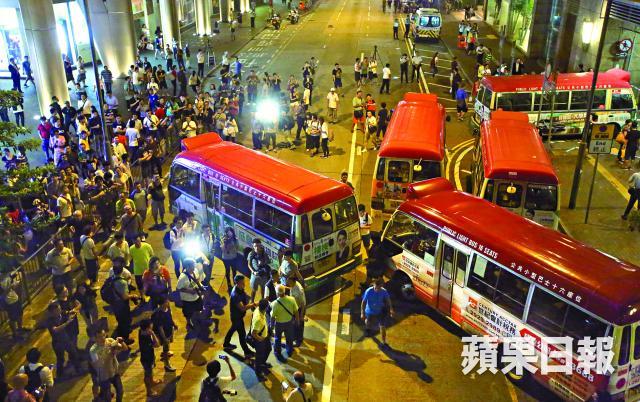
Around 20 red minibus drivers blocked off a
junction with outside Langham Place in Mong Kok with their vehicles on
Wednesday evening after discontent arose over a traffic ticket, sparking a
three-hour standoff with the police. One minibus driver has been arrested
and released on bail.
The incident kicked off at around 9pm at
the minibus terminal on Shanghai Street. A minibus driver, 62, returned to
his vehicle to find a police officer issuing a traffic ticket for violating
traffic regulations. The driver then hopped in the vehicle and drove into
the bus terminus and was said to have crossed double white lines on the
road while doing so.
A senior police officer was about to
issue another traffic ticket for dangerous driving when the driver suddenly
drove the vehicle forward. The officer said that his right hand was hit. A
number of drivers then blocked off parts of Shanghai Street with their
vehicles in protest. Three out of four traffic lanes were taken over by red
minibuses. Eyewitnesses told Apple Daily that they saw
police being physically violent.
During the confrontation, a minibus driver
was heard to shout, ôOccupy Nathan Road!ö Due to the stand-off, vehicles
were unable turn into Shanghai Street from Argyle Street, causing a long
line of traffic that extended towards Mong Kok Road.
The police and minibus drivers were able to
reach a consensus at around midnight. Drivers moved their vehicles off the
roads and traffic gradually returned to normal. The 62-year-old driver was
arrested for driving dangerously and released on bail. Both the driver and
police officer were sent to hospital.
Minibus driversÆ representatives will
reportedly head to a meeting at the Mong Kok Police Station on Thursday
afternoon to discuss the incident.
The incident came amid a series of police
crackdowns on red minibuses in the neighbourhood. Some drivers were said to
have repeatedly violated traffic regulations.
(EJinsight)
Mong Kok minibus drivers in tense standoff with police. September 10, 2015.
Dozens of red minibuses and more than 100
people blocked three lanes of a major road in Mong Kok Wednesday night in
support of a minibus driver who claimed he was attacked by a policeman after
being accused of dangerous driving. The driver was moving the vehicle to a
bus stand after being issued a parking ticket when the officer stopped him.
The alleged attack happened during an
altercation in which the policeman accused the driver of reckless driving,
according to Apple Daily. The officer claimed the minibus clipped him and
injured his right arm. When other drivers arrived, they were warned by the
officer not to interfere with a police matter.
About 30 of them drove their vehicles to
the scene in protest, blocking three lanes of Shanghai Street, as dozens of
people began to stream in. A tense standoff ensued after police
reinforcements arrived and closed the street, creating a massive traffic jam
in Argyle Street and Mong Kok Road. The drivers were later persuaded to
return to a minibus station.
Driver representatives and the police are
meeting Thursday to discuss the incident
Ling Chi-kung of the Public Light Bus
General Association said red minibuses often park outside the bus stop near
Langham Place but their drivers have seldom received parking tickets. The
drivers might have thought they were being targeted by the police,
triggering the confrontation, Ling said. He said the police should issue
warnings before handing out parking tickets.
(SCMP)
æOccupy Nathan Road!Æ: Minibus drivers bring Hong Kong traffic to a halt after
an alleged altercation over a motoring offence. September 10, 2015.
Traffic in Mong Kok ground to a halt on
Wednesday night as dozens of public minibuses blocked a busy road in protest
against police law enforcement.
The clash was triggered when a driver of a
red-topped minibus was pulled over for crossing continuous double white
lines shortly before 9pm, near the minibus terminal at Langham Place
shopping mall on Shanghai Street.
Other drivers were called in by radio and
about 20 minibuses were soon blocking all three lanes of the road. Queues of
vehicles were backed up along Mong Kok Road and nearby roads, while bus
passengers were seen getting off and walking away.
In the subsequent fracas, both sides
claimed to have sustained injuries. An officerÆs arm was hurt by a moving
minibus during an argument, a police spokesman said. He called for
assistance and was taken to Kwong Wah Hospital, Yau Ma Tei for treatment.
The driver of the minibus, who was later arrested, also requested treatment
and was taken to the hospital.
Another minibus driver, who was part of the
impromptu sit-in, said an officer had beaten a driver after issuing a
ticket. ôA driver was given a ticket. He grumbled a bit. Then I saw the
officer chasing him, slapping his vehicle and opening the door [of the
minibus] and hitting him. I saw it à And [the officer] also gave him a
ticket for ædangerous drivingÆ,ö he said. Another driver said: ô[The
officer] gave chase before hitting the driver.ö Other minibus drivers at the
site shouted: ôOccupy Nathan Road!ö
At about 11.30pm, the drivers agreed to
move their vehicles and talk to the police.
Police on Thursday confirmed that a
62-year-old minibus driver was arrested for dangerous driving. The driver,
who said he required medical assistance after being arrested, has been
released on bail. He is due to report back in late September.
(SCMP)
Don't blame Hong Kong minibus drivers for traffic offences - blame Mong Kok
terminal design, says protest leader. September 10, 2015.
Minibus drivers have blamed the poor design
of the Mong Kok terminus for parking offences at the site after dozens of
drivers blocked a road with their vehicles on Wednesday in a protest over a
policeman issuing a ticket.
Officers told a drivers' group why the
enforcement action was necessary in an hour-long meeting yesterday that a
police source described as "calm". Minibus group representatives refused to
comment after the meeting.
The chairman of the Public Light Bus
General Association, Ling Chi-keung, said the terminus at Langham Place was
too small and had only one access point for both incoming and outgoing
vehicles. This often forced drivers to wait outside for vehicles going the
other way to pass. He said police could exercise their powers not to issue
tickets for such minor offences.
The Transport Department said last night
that no one in the minibus sector expressed a view during a government
consultation in 2004 on moving the terminus to its current site.
Mong Kok district councillor Chris Ip Ngo-tung
said the only long-term solution was to build a larger terminus. One
possible site is in nearby Sai Yee Street, which is occupied by government
offices that are to be relocated.
Traffic ground to a halt on Wednesday night
as dozens of drivers blocked a section of Shanghai Street to protest over a
driver being issued a ticket.
The clash was triggered when a driver of a
red-top minibus was pulled over for crossing continuous double white lines
shortly before 9pm, near the minibus terminal. Drivers said a ticket was
issued to one driver. A police officer was injured during an argument.
Police today confirmed that a 62-year-old
minibus driver was arrested for dangerous driving last night. The driver,
who said he required medical assistance after being arrested, has been
released on bail. He is due to report back in late September.
Ling said he hoped police could exercise
discretionary powers not to issue tickets for minor traffic offences at the
terminal. ôBecause there is no space inside, the minibuses have to be parked
outside, or wait at a nearby street corner,ö Ling said. ôI hope the police
can be more tolerant, and use more warnings and appeals instead of issuing
tickets.ö He said a driverÆs daily income was around HK$400 to HK$500 and a
HK$320 ticket would take away a large part of it.
The Transport Department said that no one
in the minibus sector expressed a view during a government consultation in
2004 on moving the terminus to its current site.
Mong Kok district councillor Chris Ip Ngo-tung
said the only long-term solution was to build a larger terminus. One
possible site is in nearby Sai Yee Street, which is occupied by government
offices that are to be relocated.
(EJinsight)
Minibus drivers vow to cooperate after æOccupyÆ protest. September 11, 2015.
Protesting drivers pledged to cooperate
with traffic enforcers after occupying three lanes of a major road in Mong
Kok in support of a colleague who claimed he was attacked by a policeman.
Dozens of minibuses and more than 100 people blocked Shanghai Street
opposite Langham Place on Wednesday night after the arrest of the minibus
driver who was issued tickets for illegal parking and dangerous driving. The
drivers said police officers have started issuing them traffic violation
tickets for parking their vehicles along the street. The drivers said they
had been using a portion of the street as parking space while awaiting
passengers because the Mong Kok terminus was not adequate.
A minibus driver surnamed Wong, who was
arrested during a standoff with the policeman, said traffic officers issued
tickets without giving them any verbal warning first. He said minibus
drivers normally leave if they see that there are already too many vehicles
parked in the area which could cause traffic jams.
During a two-hour meeting on Thursday,
representatives of the drivers agreed to cooperate with the police in
traffic enforcement.
The police force said in a press release
that they will continue to enforce traffic rules to ensure smooth traffic
flow on Shanghai Street. However, police officers will exercise flexibility
and discretion depending on traffic conditions, manpower deployment and
whether a location is a traffic black spot, the statement said.
Wong said the conflict was triggered by an
incident on Wednesday, when a police officer hit him in the chest and
refused to let him go. He said he is considering filing a complaint against
the officer in question.
A driver surnamed Poon said the police
ôraidedö their ôterritoryö three days in a row instead of just asking them
to leave the area, which was the previous practice. Another driver, surnamed
Liu, captured the incident involving Wong and the police officer and
uploaded the clip online. He said the officer in question was ôrude and
arrogantö and even threatened that he could do anything to the drivers.
Ming Pao reported that the policeman had
the same identification number as the officer who was captured on video
during the Occupy protest in Mong Kok last year ordering a hotel employee to
kneel down after the latter complained that a police van had not switched
off its engine.
Videos:
Apple Daily
https://www.youtube.com/watch?v=hoKze3a6ZjY
SocREC
https://www.youtube.com/watch?v=EIfKat8imYs Eyewitness said that he
saw the police beat up the minibus driver.
SocREC
https://www.youtube.com/watch?v=r1DAGv9h84c Part 1 of street
confrontation
SocREC
https://www.youtube.com/watch?v=-csXOqcsnpU Part 2 of street
confrontation
SocREC
https://www.youtube.com/watch?v=-znOThI1uME Public Light Bus General
Association representatives leave without comments after meeting with the
police.
Resistance Live
https://www.youtube.com/watch?v=cmmjXroLD8c
Hao Zhongguo
https://www.youtube.com/watch?v=JkGzhUIaqpQ Four-eyed brother trying
to incite the taxi driver.
Siu Ching
https://www.youtube.com/watch?v=3kou6eYYtmU Woman uses megaphone to
harangue the minibuses for continually breaking traffic laws.
But the best story is the one that the
English-language newspapers won't cover.
(Wen
Wei Po) September 11, 2015.
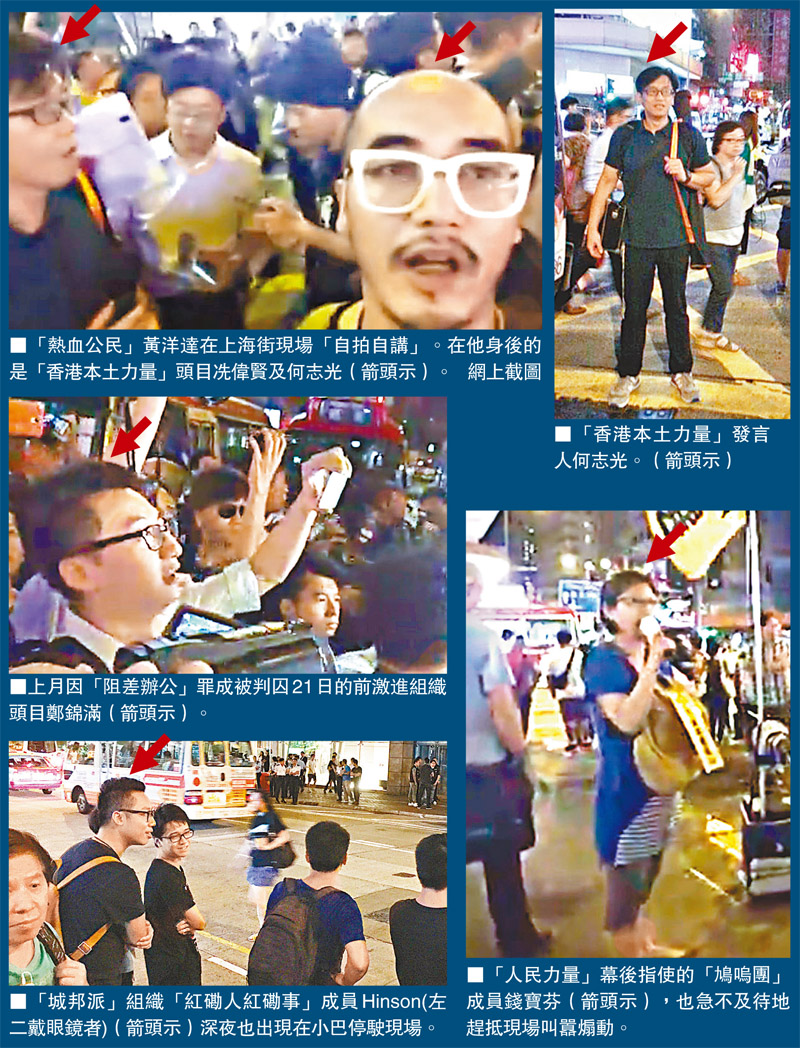
Top left: Wong Yeung-tat (Civic Passion), Hong
Kong Localism Power members CK Ho and Simon Sin in background
Top right: CK Ho (Hong Kong Localist Power)
Middle left: Cheng Kam-mun
Bottom left: Hung Hom Affairs For Hung Hom People member Hinson
Bottom right: People Power's Chin Bo-fun, who is in charge of directing the
Shopping Revolutionaries
The incident took place at around 8pm. A
traffic police officer issued an illegal parking ticket to a minibus on
Shanghai Street. The minibus drivers were upset. More than 20 minibuses
arrived to block the street to express dissatisfaction. There was massive
congestion in the area.
This minor traffic incident quickly got
picked up by the radical elements and propagated through social media. A
number of activists said that Occupy Mong Kok has re-surfaced and the masses
should rush down in support. Over at Sai Yeung Choi Street South, People
Power member Chin Po-fun was directing the Shopping Revolutionaries on their
usual activity. She
immediately seized the megaphone and brought her people over to curse the
police out.
Shortly afterwards, Civic Passion leader
Wong Yeung-tat came with several cadres. He took videos at the scene and
posted them to the Civic Passion website about the new Occupy Mong Kok by
minibuses on Shanghai Street. He wrote: "It is possible that the situation
will become even more severe." Other Civic Passion members such as Cheng
Chung-tai were not at the scene, but they responded on Facebook with texts,
photos and videos. Cheng Chung-tai wrote: "Young wastrels blocking the
street! Time to get worried?" Two hours later, the incident was over. Cheung
Chung-tai cursed on Facebook: "Damned useless!" to show his dismay that the
minibus drivers did not continue to 'occupy'.
Student Frontier leader Cheng ("Four-eyed
brother") Kam-mun filmed with his mobile phone. Through Facebook, he said:
"Occupy Mong Kok! Full-scale mobilization!" He claimed falsely: "The minibus
drivers have decided to escalate their action." He called for people to rush
to Mong Kok in support. When he learned that the minibus drivers have
reached a deal with the police and were going to withdraw from the scene,
Cheng Kam-mun began cursing in foul language on Facebook.
A number of pro-independence City-State
supporters also rushed to the scene because they didn't want to lag behind
the Localists. Our reporter spotted Hong Kong Localism Power convener Simon
Sin and spokesperson CK Ho yelling by megaphone in the crowd. According to
information, both Sin and Ho are interested in running in the District
Council elections later this year. An observer noted: "Who is going to vote
for troublemakers?"
Another City-State faction Hung Hom Affairs
For Hung Hom People member Hinson and others also came late at night. But by
that time, traffic had resumed flowing on Shanghai Street with a strong
police presence. So they were reduced to spectatorship from the curb.
(Wen
Wei Po) September 11, 2015.
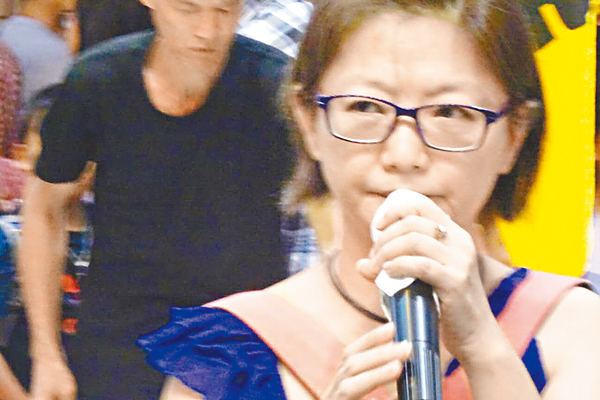
Chin Po-fun
When the minibuses started to block
Shanghai Street, the first group of radical activists to show up to exploit
the situation were the Shopping Revolutionaries from nearby Sai Yeung Choi
Street South. Many of their members come from the radical group People
Power. According to information, People Power have set up Sai Yeung Choi
Street South as their turf and they will stop other radical groups from
entering their territory. Every night, the Shopping Revolutionaries shout
and holler on Sai Yeung Choi Street South. The shopkeepers hate them because
of the damage to business, but they are fearful of retaliation if they
should complain.
At first, the Shopping Revolutionaries were
assembled by People Power executive committee member Tam Tak-chi. But Tam is
interested in running in the District Council elections, so he must stay
away. At present, the loudest voice comes from a woman named Chin Po-fun.
According to information, she is retired public servant and now an active
People Power party member.
Unlike other assemblies, the Shopping
Revolutionaries consist of a few shouters as well as a number of mysterious
men who look like bodyguards. These men say nothing and only watch
passersby. According to information, these mysterious men also accompanied
Tam Tak-chi to court. They were also present with the Shopping
Revolutionaries in Shanghai Street tonight. According to our source, People Power
was very active in Occupy Mong Kok. If there should be an recurrence, they
want to be there sooner than other radical groups.
(Oriental
Daily) September 12, 2015.
On September 9, a video was uploaded to
Facebook. The video is 2:23 long, showing a minibus driver being interviewed
by the press. He said that they want to disperse now and then decide on the
next steps. Suddenly a voice came out: "Do you trust the evil police? ... If
you leave now, what chips do you have to bargain with them?" This questioner
is "Four-eyed Brother" Cheng Kam-mun, who was mixed in with the reporters.
The minibus driver immediately replied: "Why do you have to use the
descriptor of 'evil
police'? You shouldn't call them 'evil police.' The police are trying to
make a living as well." Cheng asked again: "Are you quitting now? What chips
do you have to bargain with them? You say that you want to negotiate. You
must have some chips in order to negotiate!" The minibus driver said: "You
shouldn't say that. One thing at a time. I have all my chips already. Rest
assured, okay! You shouldn't be so excited. You shouldn't be exploiting this
situation! Okay or not?"
Initially some people thought that a
reporter was provoking the minibus driver. People also praised the minibus
driver for being reasonable and not exploited. Our reporter contacted Cheng
Kam-mun. He admitted that he was present and he asked those questions. But
he denied that he posed as a reporter. Cheng also said that he did not
incite anyone. Instead he was hoping to use his own similar experience to
make the minibus driver aware.
Internet comments:
- Here is a next-day report that would upset the
revolutionaries even more: "Our reporter observed that the minibuses in the Langham Place neighborhood today were very law-abiding. Those coming in or
out of the Langham Place minibus terminal did not take on passengers by the
exit. They pretty much kept to the order."
- "The Public Light Bus General Association representatives met with the
police and left without commenting to the media." Chances are that the
police "read
the riot act" to them. The minibus drivers are more vulnerable than
the typical unemployed/unemployable Occupy Mong Kok welfare recipient
because their means of livelihood can be impounded and their licenses
suspended. There is likely now an agreement in place, wherein orderly illegal
parking will be overlooked. However, there won't be any more minibuses parked to
block the terminal entrance while the drivers eat lunch in nearby
restaurants. The agreement probably prohibits public discussion as well.
- Why would the minibus drivers trust the
Shopping Revolutionaries/Occupy Mong Kok people? During Occupy Mong Kok, it
was the minibuses and taxis who were most opposed to these actions because their
livelihoods were being devastated. At the time, the Occupy Mong Kok people wanted the
police to ban the minibuses from parking in the streets.
(EJinsight)
December 8, 2014.
Chiu Luen Public Light Bus is facing a
backlash after it secured a restraining order from the court to stop
protesters from occupying roads in the shopping district of Mong Kok. Now
the minibus operator has its hands full trying to fend off complaints that
it is committing the same illegal activity, occupying Tung Choi Street in
the same district for parking. It is reported that Chiu LuenÆs minibuses
were using three of the four lanes on Tung Choi Street as parking area
without authorization from the transport department.
The complaints may start hurting its
business. Internet activist group Passion Times reported that at least one
of its minibuses received a parking ticket from a traffic warden in Mong
Kok on Monday morning.
Chiu LuenÆs role in spurring police to
clear the protest sites in Mong Kok has placed it on the other side of the
pro-democracy campaign. As a result, calls for commuters to boycott its
routes are spreading on social media, and many Occupy supporters are
joining the campaign. One netizen said he would rather walk than ride on a
Chiu Luen minibus.
As one of the oldest minibus associations
in Hong Kong, Chiu Luen has seen a thriving business plying the routes
from Mong Kok to Kwun Tong, Tsz Wan Shan and To Kwa Wan. On average, a
minibus driver has to pay around HK$2,000 (US$258) a month if they want to
join any of its lines, according to Apple Daily reports. The operatorÆs
route income, as it is called, could reach as high as HK$800,000 a month
for some popular routes such as Mong Kok to Yuen Long.
Reports said Chiu LuenÆs income wasnÆt
really affected by the Occupy campaign. In fact, traffic along the routes
improved because of less congested thoroughfares in Mong Kok and more
passengers were going to the area to join the protest campaign or were
switching from double-decker to minibus as their means of transport.
In its application for a restraining
order, the minibus operator said that the street occupation was hurting
the business of minibus operators as well as drivers and passengers. But
the fact is, Chiu Luen has been charging the same ômanagement feeö during
the Occupy period. So why is Chiu Luen against the pro-democracy campaign?
It is said that officials of the minibus operators are close to the
organizers of the Anti-Occupy Central Alliance.
Chiu Luen was founded in 1968 by a group
of minibus drivers who came from Chiu Chow in eastern Guangdong province.
The association now has a fleet of over 100 minibuses with 300 drivers.
Unlike the green minibus, Chiu LuenÆs red minibus lines offer
non-scheduled services. The minibus industry often criticizes the
government for setting too many restricted zones that only apply to
minibuses, and complains that minibus drivers are always ticketed for
illegal stopping and parking in these restricted areas.
Chiu Luen would often represent the
industry to negotiate with the government. Sometimes, it would even
organize strikes to press its demands. Such actions have prompted
authorities to look the other way when minibuses are illegally parked,
sources say. Although the practice is illegal, red minibuses have been
parking on Tung Choi Street for decades, according to one Chiu Luen
driver.
The public light bus or minibus service
became legal as a result of the 1967 Hong Kong riots. At the time, workers
of China Motor Bus and Kowloon Motor Bus went on strike, crippling public
transport in the city. As no buses and trams were plying the streets, the
minibuses entered the scene. In the early days of their operations,
minibuses had to fight for routes, and reports suggest that some of the
operators established ties with gangsters. They also found ways to deal
with traffic policemen. Thus, Chiu Luen gradually developed its
connections and extended its influence.
But will it be able to withstand the
boycott campaign being put up by Occupy supporters?
So why would the minibus drivers think that
Civic Passion/People Power/Hong Kong Indigenous/Hong Kong Localism
Power/Hong Kong City-State will ever really be on their side? The modus
operandi of the radical elements is to throw the first rock and then
disappear before the full-scale riot breaks out.
Video: Apple Daily
https://www.youtube.com/watch?v=73rvpI8j2dw Earlier about 200 Shopping
Revolutionaries surround the Chiu Luen minibuses to protest the fact that
they park in the street.
- Anyone with half a brain would know that
the minibus drivers can't and won't do anything like Occupy XXX. If they use
their minibuses to set up a blockade on Shanghai Street, then what gets
affected immediately? Minibuses won't be able to enter the terminal to pick
up or discharge passengers! That is to say, they are going to kill off their own
livelihoods by their own actions. If some protest action is to take place, it will be elsewhere
(e.g. Mong Kok Police Station).
- The most effective police response is to help the
minibus drivers occupy Shanghai Street
by using police cars to seal off both ends and blocking all vehicular
traffic in the area. It will quickly sink into the
heads of the minibus drivers that they are losing money by the minute.
- Also, most of the minibus drivers do not own the vehicles. Most vehicles
are concentrated in the hands of a few individuals who have managed to
become immensely wealthy (at least, on paper based upon the number of
licenses that they own and the fact that the cost of a minibus vehicle is somewhere
between $900,000 and $1,300,000). While this action may have been started
spontaneously by the drivers, the ultimate decision will be made by the
owners. The owners won't destroy their own wealth (in the form of license suspension or
damage/destruction of the vehicles during a riot which may not be covered by insurance). The
radical activists are fantasizing when they think the minibus drivers will
escalate the action. They know nothing about the socio-economic environment.
- When Mao Zedong was talking about that
single spark in the prairie, the situation was that the Chinese Communist
Party was still too small to lead the people into mass actions. Instead,
they had to wait for opportunities to jump onto. This is the same with the
radical Localists right now. For example, when North District Parallel
Imports Concern Group held its guided tour of the Sheung Shui parallel
trading stores, only a dozen or so people showed up. Nobody is going to pay
attention to them. What they needed is something like the Reclaim Sheung
Shui the week before when violence is hinted, and that attracted outsider
demonstrators and reporters like flies.
- (Resistance
Live Media via YouTube) At around midnight on September 9, Shen Tai-fung
finished supporting the Langham Place minibus drivers and returned home. He
was attacked by three men at New Town Mall and warned "Not to cause so much
trouble." Shen chased the men while calling for people to summon the police.
At the CLP building in Mong Kok, he clashed with the three men once again.
When he reached Dynasty Theatre, he was too weak from blood loss and sat
down to wait for help. Shen Tai-fung said that the incident is related to
his participation in the To Kwa Wan District Council election.
(EJinsight)
Anti-parallel trading protests linked to upcoming elections. September 8,
2014.
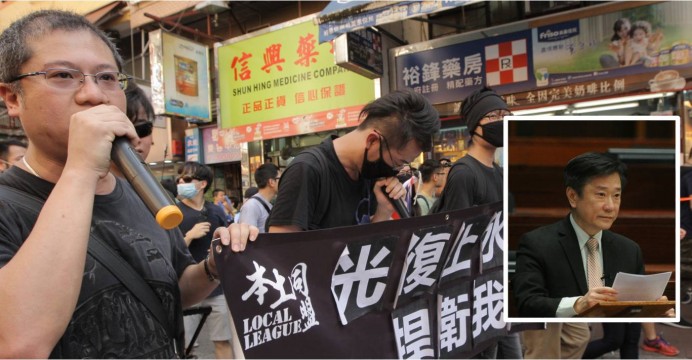
Legislator Yiu Si-wing (inset) said the protests were aimed at wooing voters
in the District Council elections. But activist Ronald Leung (holding mike)
said the protests were going on for the past three years
Legislator Yiu Si-wing, who is also a director at China Travel Service (Hong
Kong) Ltd., said the recent protest against mainland parallel traders in
Sheung Shui was part of efforts by some people to solicit votersÆ support in
the upcoming District Council elections. Yiu, who represents the tourism
sector in the Legislative Council, said in a radio program on Monday that he
felt it was strange that anti-parallel trading protests re-emerged in the
past few days even though the government is addressing the problem through
tighter customs inspections and a plan to build a shopping facility at the
border. Yiu said the protests were hurting the local tourism industry.
But
Ronald Leung Kam-shing, a spokesman for the North District Parallel Imports
Concern Group, disagreed with YiuÆs comments, noting that such protests have
been going on for the past three years. Leung said it was laughable that
someone would think the protests were related to the elections. He said
those who are saying so are simply trying to discredit legitimate protest.
Legislator Vincent Fang Kang said the wholesale and retail sector which he
represents is going through a difficult period that is worse than the
situation during the SARS outbreak in 2003. He blames declining retail sales
in the city on protests targeting mainland visitors and shoppers.
According to the Census and Statistics Department, retail sales for the
first seven months this year dropped 1.7 percent from a year ago, but
plummeted 6.1 percent during the same period in 2003, when Hong Kong was hit
by SARS. Legislative Council president Jasper Tsang Yok-sing refused to
speculate on whether the protests were related to the District Council
elections, but stressed that such mass actions would not help any election
campaign.
Leung
said it was Yiu who was taking an overly political perspective on the
protests, which should not be regarded as part of an election campaign.
Meanwhile, the Federation of Hong Kong Trade Unions in Tourism issued a
statement blasting the anti-parallel trading protesters for being
ôuncivilizedö and hurting the interest of the local tourism sector. The
union said it feared such protests would lead to more layoffs in the
industry.
(Oriental
Daily) September 8, 2015.
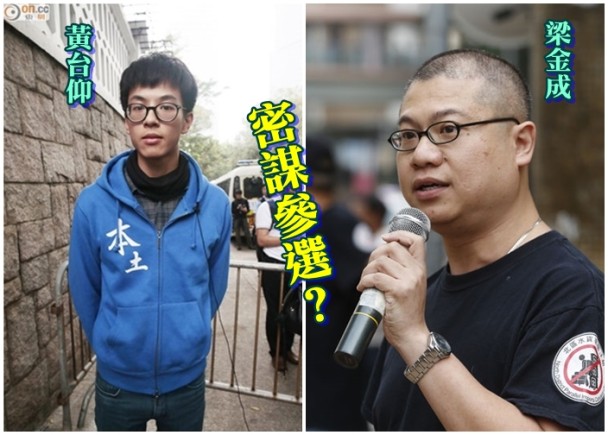
Hong Kong Indigenous' Ray Wong; North District
Parallel Imports Concern Group's Leung Kam-shing
Early this year, the radical localists
initiated the Reclaim actions to sharply reduce the number of mainland
tourists coming to Hong Kong. Six months later, they started Reclaim Sheung
Shui again. This is allegedly tied in with the publicity for localist
candidates in the District Council elections this November. At least four
radical localists interiorare planning to enter those elections. Is it possible that
even people who try to destroy local jobs can attract voters?
Candidate #1: Hong Kong Indigenous' Ray
Wong took part in Reclaim Sheung Shui
last Sunday and was arrested by the police. According to some sources, Ray
Wong will enter the To Kwa Wan North district election in Kowloon City to
challenge DAB legislative councilor/district councilor Starry Lee. But this
is actually a smokescreen because the real candidate is another Hong Kong
Indigenous spokesperson Leung Tin-kay, who is studying philosophy at the
Hong Kong University. Leung will be feeding off Ray Wong's fame.
Candidate #2: North District Parallel
Imports Concern Group spokesperson Ronald Leung Kam-shing has been uploading
to Facebook photos of himself passing out flyers at the Sheung Shui MTR
station. According to some sources, Leung wants to challenge the New
Territories North District Council president So Sai-chi. However, Leung
admitted in an interview that local reception was not enthusiastic. So he
may be considering another district. This is a case of conceding defeat
before the race even got started.
Candidates #3/#4: Hong Kong Localism
members Simon Sin and CK Ho gained notoriety in the demonstrations against
12-year-old Siu Yau-wai.
They are now changing their modus operandi. According to the group's
Facebook page, Simon Sin has gone to test lead-levels in the water at Tsui
Ping Estate, Kwun Tong. Meanwhile, CK Ho has been present at street booths
in Po Tat (Sau Mau Ping) and Wong Tai Sin.
The pro-establishment camp does not seemed
concerned about these localists who parachute into local communities out of
nowhere. Their initial reaction is that
voters will not support people who destroy jobs.
(Oriental
Daily) September 9, 2015.
This morning, Hong Kong Indigenous
spokesperson Ray Wong admitted that they are actively recruiting people to
run in the district council elections. They hope to use the elections to
publicize Localism and ambush the pro-establishment candidates. Wong denied
that the Reclaim actions were intended as electioneering tactics. He said
that he was merely a participant and not an organizer in last Sunday's
event. He also said that he won't be running in the elections.
(HKG
Pao) September 15, 2015.
According to Wen Wei Po, Civic Passion
member Cheng Chung-tai has recently been showing up in the Lok Tsui district
in Tuen Mun to distribute pamphlets and make speeches. His point was that it
was expensive to do food shopping in the Mei Lok Gardens because the
current district councilor Democratic Party's Albert Ho had supported the
privatization of the Link REIT which brought in supermarket chains to
replace the mom-and-pop stores. Cheng also said that Ho is failing in his
position as Legislative Councilor. It seems clear that Dr. Cheng plans to
challenge for Ho's seat.
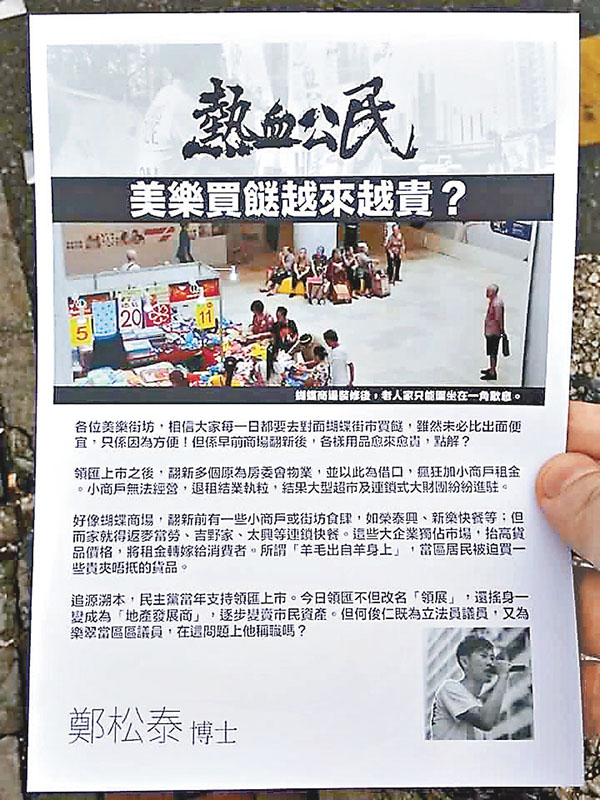
(Wen
Wei Po) September 17, 2015.
More recently, Cheng Chung-tai (Civic
Passion) has started another wave of criticism against Albert "AV Yan" Ho
Chun-yan, focusing on four points: (1) Ho supported the privatization of
Link REIT; (2) Ho promised to resign in order to trigger a de facto
referendum in the by-election, but he failed to carry it out and chose to
hold secret meetings with mainland government officials instead; (3) Ho
assisted newly arrived immigrants to ask for a judicial review in order to
receive social welfare immediately; (4) Ho supported the construction of the third
runway at the Hong Kong International Airport when he is also on the board
of directors of the Airport Authority.
Last Tuesday, Civic Passion threatened to
disrupt the Tuen Mun District Council meeting. On that day, Cheng Chung-tai
brought about a dozen or so supporters to the scene. They stayed for about
10 minutes but left when they couldn't see Albert Ho. Instead they went to
Lok Tsui to hand out pamphlets about how Albert Ho is betraying Hong Kong.
In February 26, 2014, Albert Ho was filmed
by the media as viewing sexy girlie photos while the Legislative Council was
in session debating the government budget. Ho was probably not planning to
run for District Council again. He arranged for a lawyer to parachute into
his district. However this lawyer showed up for only about 1 month of so in
April/May this year and has since disappeared. Meanwhile "AV Yan" is back in
full gear.
According to information, Raymond Wong
Yuk-man is sending Cheng Chun-tai to run in the Lok Tsui district because
the middle-class citizens there are more likely to be impressed by Cheng's
doctorate degree. However, Cheng is not interested in the district council
seat. Instead he is drilling in preparation for the 2016 Legislative Council
election in New Territories West.
The Democratic Party is aware of what is
happening. Therefore "AV Yan" is forced to postpone his retirement. Meanwhile,
the Democratic Party has to modify its plans in other Tuen Mun districts
mainly because some of their candidates are upsetting residents.
In the last District Council election,
Raymond Wong Yuk-man sent out Chan Wai-yip to run against Albert Ho under
the slogan "Repay by voting." Chan lost badly against Ho. Afterwards Wong
insulted Chan by saying: "His quality is poor and so we can't blame the
'repay by voting' strategy." Chan immediately severed relations with Wong.
Internet comments:
- If the localists run in the district
council elections, will they still be wearing black masks on their campaign
posters?
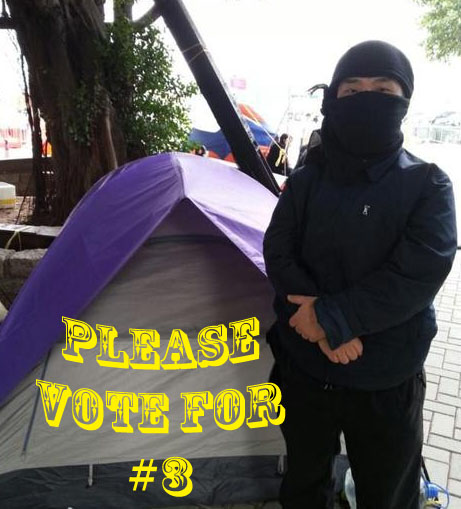
- Of course they will wear masks. How could people recognize them otherwise?
- Ray Wong's campaign poster:
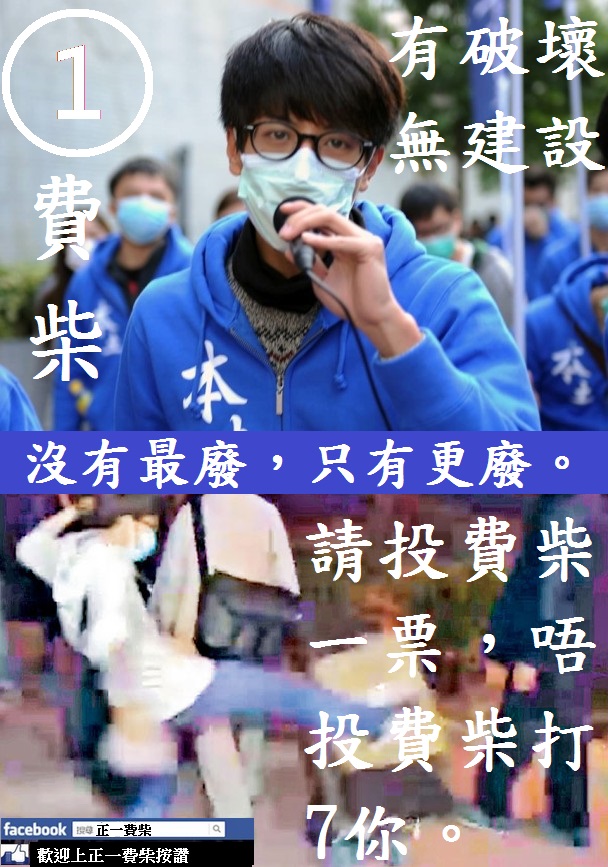
Candidate #1: The Wastrel
Sheer destructiveness, no constructiveness
There is no maximum uselessness, there is only greater uselessness
Please cast a vote for The Wastrel. If you don't vote for The Wastrel, he
will fucking beat you up.
- It is a basic human right to cover your face if you should so choose
to.
Many countries in the world have the
Sharia law for just this.
- The Hong Kong Police's
Special Duties Unit (nicknamed Flying Tigers) wear masks on their missions too.
- The greatest Hong Kong movie ever is
Election:
Even triad gangs can hold democratic elections but the Communists China
won't let Hong Kong have it.
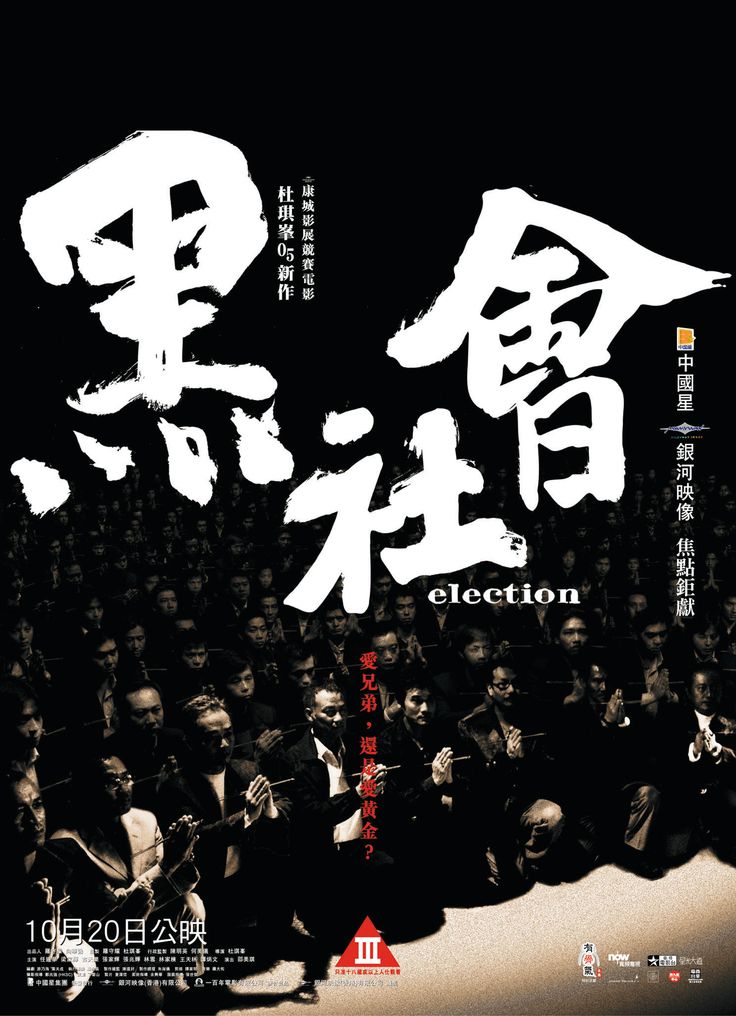
- Indeed, here is the Hong Kong University Students' Union triads led by Billy
Fung Jing-en:
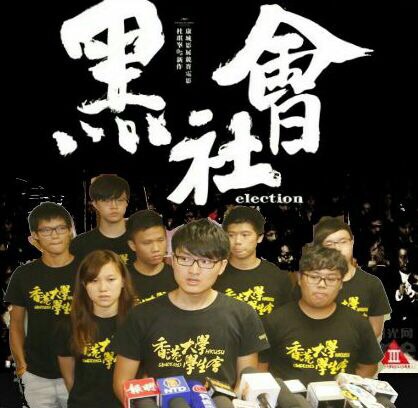
Next we need an Election poster for Ray Wong and Hong Kong Indigenous.
- District Councils deal with truly
microscopic issues, such as planting a tree at the intersection, placing a
bench at the bus stop, moving the bus stop 20 meters down the road, etc.
Voters look for someone who has lived in the district for a long time and
has a lot of social ties (with Property Owners Association, Parents Teachers
Association, etc). Parachuters with no local ties and knowledge have no
chance (especially if they insist on wearing black masks).
- The name of the game is $MONEY$. When you
enter to run, you have the opportunity to solicit donations. If you win, you
get a job position that pays about $22,000 per month plus an operating
expense subsidy of about $30,000 per month. The District Council is the
springboard to the Legislative Council, where the job pays about $93,000 per
month plus expenses subsidies as much as the salary itself.
- When you come into the limelight, you
will be scrutinized. Such is the case of Ray Wong:
(HKG
Pao) September 9, 2015.
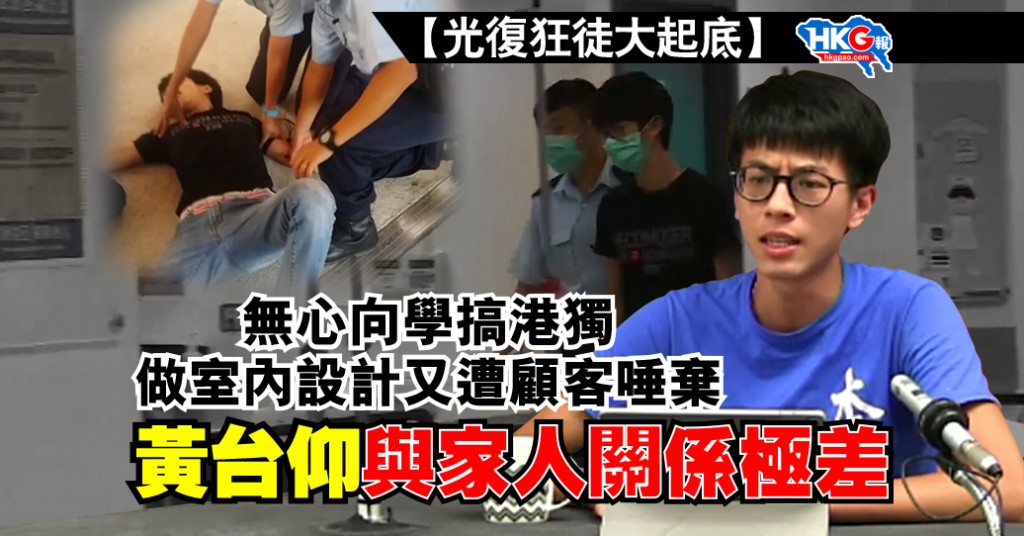
Our reporter found out that Ray Wong Toy-yeung
was born in 1993 and is 22-year-old now. He is thin in stature, he usually
wears black round-rimmed glasses. He was rebellious and was not a good student.
In the Hong Kong Certificate of Education Exam, he did not score high enough
to make university. So he entered the Caritas Bianchi College of Careers
to pursue an associate degree in interior decoration. In 2013, in the last
year of his studies, he dropped out of school due to a difference of
opinion with the teaching staff. Thereafter he worked as a freelancer in
interior decoration. His income was unsteady, and his clients were mainly
introduced by friends and previous clients. Last year before he entered
radical politics, he claimed to have engaged six jobs averaging $60,000 in
profits per job. So his income was good.
Ever since he started the anti-parallel
traders demonstrations, his business was greatly affected. He admitted
that "China-capital companies won't seek me out and Blue Ribbon decorators
won't work with me. Some clients are worried that if I got arrested in the
middle of a project, then what happens to the project and the deposit?"
Therefore, he has not gotten any more business since the Lunar New Year.
Ray Wong said that he was most influenced
by Wan Chin's book <The Hong Kong City-State Theory>, and his political
views are influenced as such. However, he does not think that the
City-State theory is feasible in Hong Kong. Instead, he thought that the
Hong Kong University Undergrad's theory of ethnic self-determination was
more relevant for the people to Hong Kong to build their local ethnic
awareness.
Ray Wong comes from a middle-class
family. His father is an engineer and his mother works for a trading
company. His radical behavior has caused relations with his parents to
deteriorate. At one time, he left his family and he has not improved
relations since. He loves cycling, skateboarding, music and moves. He is
up on current affairs. He tracks the latest information on Hong Kong
politicians, organizations, traditional and Internet media. He is active
on social media where he expresses his personal views. His language is
radical, often mixed with obscenities.
Although Ray Wong does not think that
Hong Kong Indigenous is like Civic Passion, his Facebook carries two
photos: one in the sound studio of MyRadio which was established by
Raymond Wong Yuk-man and another group photo with Raymond Wong, Wan Chin,
"Four-eyed Brother" Alvin Cheng. This suggests that his group and Civic
Passion come from the same roots -- namely, they are Raymond Wong's
people. According to an informed source, Hong Kong Indigenous deliberately
differentiates itself from Civic Passion but they only do so in order to
get twice the exposure for localism. If the police should bust one group,
the other can still carry on.
According to Ray Wong, the Hong Kong
Indigenous group has about 50 core members who want to defend "Local
values." Group members use this Facebook of a masked blue cartoon ninja
icon for identification:
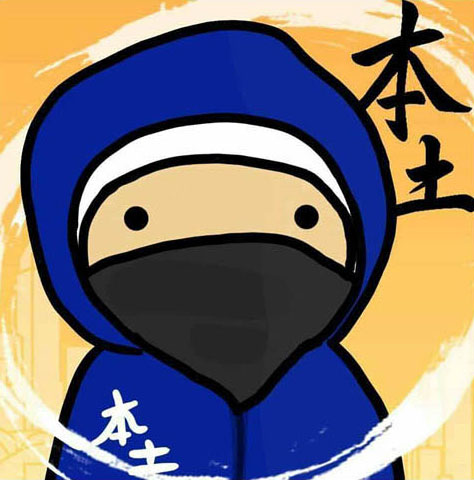
Why is the ninja clad in deep blue, which
is the color of the Blue Ribbon foes? Ray Wong explained on Facebook:
"Hong Kong Indigenous wears blue jackets in order to disrupt the
dichotomization of Yellow Ribbon versus Blue Ribbon by the mainstream
media. This is even better for promoting localist ideas."
Internet comments:
- Why is Ray Wong so anxious to see small
businesses flop all over the place? Because when you discontinue your
rental contract, you have to restore the site to its original condition.
And you need to hire an interior decoration contractor to do that. And Ray
Wong is willing and able to fill that role.
- Why didn't this article publish Ray
Wong's home address? I am curious as to whether he lives in Sheung Shui or
not. Wouldn't it be funny if he lives in Tuen Mun or Chai Wan, which are
more than one hour away? After all, those XXX Affairs for XXX People
organizations (where XXX = Hung Hom, Sheung Shui, etc) insists that local
affairs can only be decided by local people.
- This is actually more localism within localism.
At the top level, it means that Hong Kong
affairs should be decided upon by the people of Hong Kong.
At the next lower
level of the 18 districts of Hong Kong, it means that Sheung Shui affairs should be decided
upon by
the people of Sheung Shui, Wan Chai affairs should be decided upon by the
people of Wan Chai, etc.
At the next lower level of sub-districts, it
means that Cheung Chau
affairs should be decided upon by the people of Cheung Chau.
At the next
lower level of neighborhoods, it means that affairs on the block
surrounded by Nathan Road, Soy Street, Dundas Street and Sai Yueng Choi
Street South should be decided upon by the residents of that block and not
by a bunch of yahoos from the outside.
At the
next lower level of buildings, it means that affairs in the
Sun Hing Building
should be decided upon by the people who reside in that
building.
At the next lower level of floors, it means that affairs on the
16th floor of the Sun Hing Building should be decided upon by the people
who live on that floor.
At the next lower level of families, it means that
family affairs should be decided upon by family members.
At the next level of social dyads, it
means that affairs of two individuals should be decided upon by those two
individuals. For example, husband-and-wife, father-and-son, etc.
At the next level of individuals, it
means that what I do is my business and the rest of the world should just
fuck off!
This sounds fine,
but it won't work -- what if the people on the 16th floor of the Sun Hing
Building vote unanimously to just dump their garbage out of their windows onto Nathan Road
below? What if I decide to set my bed on fire and burn the whole building
down instead?
- I thought that there was going to
something new, but Ray Wong is just another unemployed bum living off
social welfare like Umbrella Revolution stalwarts such as
"Captain America" Andy
Yung,
"The Painter" Eric Poon,
"Capone" Ng Ting-pong.
In Soviet Russia, they would have charged these people with
parasitism. In 1964, the Russian poet
Joseph Brodsky (1987 Nobel Prize in Literature) was charged with
social parasitism because his series of odds jobs and his role as a poet did
not contribute to society. They called him a "pseudo-poet in
velveteen trousers" who failed to fulfill his "constitutional duty to work
honestly for the good of the motherland."
- Not true. Ray Wong claimed that he made $360,000 last year. If he is
frugal, he has enough savings to fight some more years for Freedom,
Democracy, Human Rights and, most importantly, Local Values.
- Well, I'll bet that Ray Wong did not pay his income taxes like other
honest Hong Kong citizens. He probably even filed for social welfare
unemployment benefits too while having an unreported income.
- Rubbish. Who has ever heard of an inexperienced interior decorator
without even an associate degree making that kind of profit!? Even
experienced interior decorators working on large projects can't do that.
The average profit margin is 2%. So a project would have to worth $60,000
/ 0.02 = $3,000,000 to generate $60,000 in profits. How many $3,000,000
projects are out there when the average price of apartments are just in
the millions? What are you trying to build? The Eiffel Tower? The Empire
State Building?
- When you are young and inexperienced, the only way you can bid for a job
is to have razor-thin profit margins. You may even have to lose
money purposefully in order to gain the experience.
- Many other Occupy Central regulars just live off their parents. However, Ray
Wong has the integrity to disown his parents. In matters of great right
versus great wrong, the law comes in second place and the family comes in
third place.
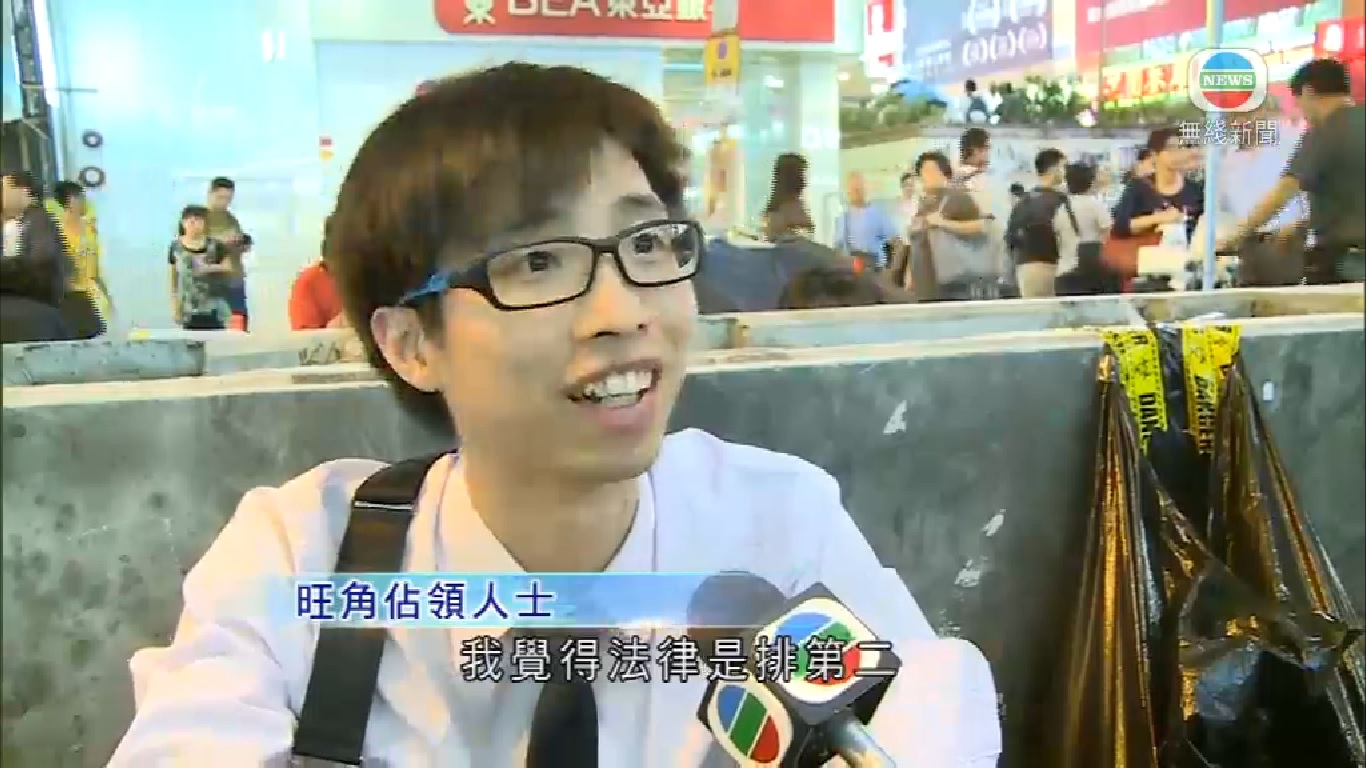
Here is a TVB screen capture of an Occupy Mong Kok demonstrator
announcing: "I feel that the law comes second."
- Normally I am likely to say: "May his
whole family drop dead." But in Ray Wong's case, I pity his parents who
brought up such a difficult child. So I say: "May Ray Wong drop dead."
- No, he came out this way because his parents brought him up this way.
They should be made to repay society for the damages wrought by their son.
- Jackie Chan was right: "The Chinese
needs to be supervised (中國人是要管的)."
Ray Wong is a fine illustration.
- Hong Kong Indigenous numbers only 50
members, or so Ray Wong claims. Why do the other 7 million Hong Kong
residents have to accede to their wishes?
- If there are 1.2 million Occupy Central
participants as reported by the Hong Kong University Public Opinion
Programme, some of them can surely bring Ray Wong some business, so that
he can continue to fight for "localist values." Where are they? Are they
all talk and no action? Or all talk and no money?
- This is the first of the many hatchet
jobs on Ray Wong and his cohorts. I wasn't as appalled as I thought I
might be. There are actually plenty of other avenues to explore. I look
forward to future installments (such as the one about his living
conditions -- how he is growing his own chickens, rice and vegetables;
setting up his own water supply; generating his own electricity and
collecting rainwater because he
is practicing Localism as opposed to just talking about it).
- I want to ask Ray Wong: Why do you
people wear masks? Is there something really bad in the air, and why won't
you tell us? More importantly, how can you represent us when we don't even
know what you look like?
- Ray Wong wears a mask for business
reasons, so that his prospective clients won't recognize him when they
come in to discuss proposals, negotiate prices and sign contracts. Why
would you hire an interior decorator who could end up in jail anytime and
leave your project unfinished?
- The case of Ray Wong makes me think of
a uniquely Hong Kong term: "Litter
cum recycling."
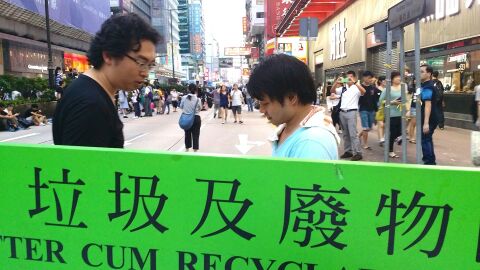
Ray Wong is definitely "litter" for sure. I am not sure if he is "cum"
which is useful for procreation. But he should be sent to "recycling."
- (Foreign
Policy) Meet the Man Who Wants to Make Hong Kong a City-State. May
18, 2015.
Beneath an elevated subway station,
with cars whizzing past, Ray Wong exhorted citizens on a recent Sunday
to join a revolution û just not in so many words.
ôIf we allow communists to prescreen
our chief executive,ö the head of Hong KongÆs officially independent
government, then ôthe chief executive will not represent us!ö Wong
boomed into a microphone. He scanned the tide of pedestrians sweeping
past, searching for a receptive ear. The city, he said, must reject a
Beijing-backed elections plan thatÆs up for a vote this spring and defy
Chinese leaders from exerting more control over Hong Kong. Remember,
Wang noted, that the nation silenced the last call for democracy in
1989. ôIf you do not want the slaughtering-unarmed-students communist
government to prescreen our chief executive, we must stand firm and
reject this arrangement!ö WongÆs lanky frame was decked in a crisp,
light blue tee shirt with white letters reading, ôHong Kong Indigenous.ö
Most shoppers scooted to a nearby mall without looking his way.
These are low days for democracy in
Hong Kong. A few months back a massive street occupation sought free
elections and beckoned everyone to debate the cityÆs political future.
Since then, the Hong Kong Federation of Students, the university group
that led tens of thousands of people to stand up to riot police,
splintered, accused of being opaque and incompetent. Scholarism, another
student group that led protesters, has been muted, focused mostly on
posting objections to the election plan on social media. Old guard
democrats are playing parliamentary games. Weeks from a vote that could
give Hong Kong its first direct elections in history û albeit for
candidates backed by Beijing û with the city split on the plan, the fire
and heat of last fall has been doused.
Into this vacuum has stepped Wong and
dozens of angry youth. Their friendships forged during the protests,
many of them said they had wanted to provoke the police during the
occupation to force government concessions, but lost out to more
moderate voices. Since then, these activists have argued online and on
the streets that Hong Kong, 17 years after Britain turned the colony
back to Beijing, would be better off without China. For the city to self
govern, these youth say, it must fight off a mainland ôincursionö that
threatens the cityÆs language, culture, and traditions that are distinct
û and superior, they argue û from those of the PeopleÆs Republic. Their
first step has been to discourage mainland arrivals.
Weeks after the police cleared the
protest camps, Wong started Indigenous, a grassroots group with about 40
members, and headed to the cityÆs northern suburbs near the mainland
border. There Wong, along with members of the radical political party
Civic Passion, led hundreds of people to protest the illicit trade in
powdered baby formula and other goods hauled off in suitcases by
mainlanders. The gatherings were ugly and at times violent, with
participants cursing at mainland tourists riding northbound buses. To a
degree, the demonstrations worked. After the third gathering, the
central government said it would restrict Shenzhen residents to one
visit a week. It was the kind of concrete concession democracy
protesters had failed to secure.
WongÆs brand of nativism has attracted
working-class youth as well as elite college students and graduates
frustrated by the slow drip of political change. Many agree with WongÆs
message that preserving Hong Kong for Hong Kongers is the best way to
fight for democracy. If residents strengthen the cityÆs identity, they
will be ready one day to leave the mainland and form a city-state akin
to Singapore, he said. But he cautioned that Hong Kong citizens arenÆt
ready for that yet. ôWeÆre not creating trouble for nothing,ö he said,
speaking carefully in an interview with Foreign Policy. ôMany Hong Kong
people donÆt want to see Hong Kong become just another Chinese city.ö
Admirers and critics say Wong has
tapped into the anxiety of modern Hong Kong youth who fret about their
future under China in this hyper-competitive, uber-expensive city.
According to the agreement forged between the mainland and Hong KongÆs
former ruler, Britain, the city remains technically autonomous until
2047. Those freedoms seemed to have perished for many last June when the
communists decreed in writing that the city was subservient. The report
was seen as a betrayal by many and especially inflamed youth who didnÆt
remember the days of colonial subservience. ôItÆs fear of China, fear of
the [Communist Party], fear of invasion, fear of losing our culture, our
language,ö said Raphael Wong, a 27-year-old member of the League of
Social Democrats whoÆs critical of the tactics of Ray Wong (no
relation). ôAnd fear makes anger.ö
The seeds of nativism sprouted in the
massive fall occupation, sowed by members of the Civic Passion party, a
theatrical group of radicals who spread the notions of self-governance
to youth through a manga-filled print magazine, Passion Teens Weekly.
But the ideas, known here as localism,
date back. In 2006, activists tried to save area landmarks as city
bulldozers cleared paths for more skyscrapers and rail lines. Arguments
made to preserve Hong KongÆs ferry pier and farmland û vestiges of the
best of British colonialism and traditional China ù were rooted in the
writings of an ethnography professor at Lingnam University, Horace Chin
Wan-kan, said Sonny Lo, a political science professor at Hong Kong
Institute of Education.
In 2011, Chin asserted in a book that
Hong KongÆs route to independence rested not on a future democratic
China, but on the cityÆs re-birth as an autonomous city-state. ChinÆs
edgy theories made the book a hit, but his subsequent knock on democrats
who have staged an annual vigil for victims of the Tiananmen Square
massacre bruised his reputation. (Chin did not respond to requests for
an interview.) Few advocates, though, have grappled with the
inconvenient truth that Hong Kong depends on the mainland for much of
its energy, water and food.
ChinÆs theories primed the city for the
2012 battle against a proposed patriotic schools curriculum. After
massive strikes led by school children, the then-new chief executive,
C.Y. Leung, decided that schools could opt to use the lessons or not.
Still, fears grew that communist notions were creeping into Hong Kong
through the growing number of mainland residents arriving to give birth,
attend school, and work. Far more Hong Kong locals told pollsters that
they were Hong Kongese than said they were Chinese.
By last August, when a committee of the
mainland legislature presented Hong Kong with an blueprint for the 2017
elections ù rejecting the notion of public nomination and dictating that
chief executive candidates would be screened ù the cityÆs localists were
primed. Some residents have said itÆs a low-grade battle that could drag
on for decades.
ôThe Hong Kong perspective is becoming
stronger and stronger,ö said Lo, who is publishing a book in July about
prospects for Hong Kong democracy. ôAs long as Beijing is paternalistic
in terms of Hong Kong, there will continue to be confrontation and
arguments between the young people and the central government in
Beijing.ö If the number of nativists grow, he added, ôthe Hong Kong
people will be divided, deeply divided.ö
On his social media and his Internet
radio show, Wong of Hong Kong Indigenous is busy building his case. A
mainland ôincursionö is stripping residents of their identity and
rights, says Wong. He points to the increased use of standard Mandarin
in Hong Kong schools instead of the native Cantonese. The growing number
of mainland migrants, he says, will be ôdiluting the ratio of local
people.ö More mainland arrivals are ôdepriving us of resources,ö he
said, especially in primary schools, public housing and certain jobs. (A
2014 Hong Kong government study rejected such claims.)
In a city already teeming with
competition, WongÆs speeches have tapped into the frustrations and angst
of the cityÆs youth, said Cheng Chung-tai, a member of Civic Passion. He
helped lead the winter baby formula protests against mainland traders.
ôWe are facing a big and powerful invader,ö said the university
lecturer. ôIf you can feel that Hong Kong is facing a situation of
re-colonization by the Communist Party, then you can call yourself Hong
Kong indigenous.ö
The fight for an independent Hong Kong
will no doubt be long, perhaps violent, Wong says solemnly. But he says
heÆs prepared to lead, if asked. If brute force is the intended tactic,
Wong hardly appears equipped. At 125 pounds, with his Harry Potter
spectacles and a bed at his parentsÆ apartment, the lanky graduate
doesnÆt look like he could withstand one blow of a police baton. He
described his several arrests during the fall and winter protests and
showed a picture on his phone from the November night when he claimed to
have helped a gang ram metal barricades into the windows of the cityÆs
legislative chambers.
He then caught himself and countered
that he doesnÆt directly advocate violence. But itÆs clearly part of the
plan. During a March taping of his radio show, his voice clear and
steady, Wong said that once Hong Kong citizens realize theyÆre facing a
crisis ù that their culture and community has been ôinfiltrated by the
communists,ö and they are being ôoppressed,ö then ôtheyÆll gradually
develop an antagonistic ideology. This,ö Wong concluded, ôcan be our
so-called preparation for the next mass fight.ö
- (HKG
Pao) September 17, 2015.
On September 13 (Sunday), Ray Wong and
members of the League of Social Democrats, the Labour Party, Scholarism
and other radical groups went down to Hong Kong Police Headquarters to
protest his own arrest in Sheung Shui and unjustified arrests in
general. Those present included League of Social Democrats
vice-presidents Wong Ho-ming and Ng Man-yuen, former Federation of
Students deputy secretary-general Lester Shum, Labour Party member Chow
Nok-hang, etc. These people are classified as "Leftist Retards" by the
Localists. So when Ray Wong was reported to be present, the Localists
turned on Wong for betraying their cause. Cemetery News said that Wong
was a "traitor" and a "piece of trash" who will "go to hell."
Early on Monday morning, Ray Wong wrote
more than 1,000 words to defend himself. Wong said that he did not
attend the demonstration in order to "unite with leftist retards" but he
"wanted to use the occasion to expound upon Localist ideas." But his
clarification only drew more attacks from the Localists. Some Internet
asked Legislator Raymond Wong Yuk-man to boot Ray Wong off his Internet
radio program under the threaten of withholding monthly subscription
fees. Meanwhile Civic Passion leader Wong Yeung-tat said that Ray Wong
is no longer a fellow traveler.
To dampen passions against Ray Wong,
Raymond Wong asked his radio station director Leung Kam-cheung to play
guest host on the radio program alongside Ray Wong and others. During
the program, Leung repeatedly condemned Ray Wong for being "fucking
stupid" to attend the demonstration. Leung said: "You are not permitted
to commit this type of mistake again" and "I cannot give unconditional
support to those who make mistakes." Ray Wong also made abject apologies
a number of times.
Just when people thought that the
affair will die down after Ray Wong's apology, his supporters
counter-attacked on Wednesday. They condemned Leung Kam-cheung of
"acting like a bully" and "coercing people to apologize." Meanwhile, the
Localists' leader Raymond Wong Yuk-man has been completely silent. A
supporter noted: "Whenever there is trouble among the Localists, the
founder becomes a turtle hiding inside its shell. With a founder like
this, who needs enemies?"
- (Polymer)
Leftist retard villains, revolutionary hypocrites. September 11, 2015.
Among those in the resistance movement of
social activism, the better known people right now are City-State's Wan
Chin, Legislative Councilor Raymond Wong Yuk-man, Civic Passion's Wong Yeung-tat
and certain post-Occupy figures such as Hong Kong Indigenous' Ray Wong
Toy-yeung, former Student Frontier's "Four-eyed Brother" Cheng Kam-mun,
North District Parallel Imports Concern Group's "Grandmaster Kam-kam"
Ronald Leung Kam-fat, etc.
... Over the three months of the Occupy
movement, those who were present at the sites have recognized the true
nature of the Leftist Retards. The enemy and ourselves are clearly
distinguishable. We know now that the Leftist Retards' narrative is
"poison." If we have to make another critique, it would only be for the
benefit of the ignorant Hong Kong 'pigs' so that they won't be victimized
by that evil cult.
The Revolutionary Gang (the title came
from a Wan Chin essay) is now best known through Hong Kong Indigenous' Ray
Wong Toy-yeung and City-State's Wan Chin. In recent Internet battles, the
"Lam Lei-yip's opinion about the dress uniform of Hong Kong Indigenous"
and "Wan Chin and CK established their differences" issues have drawn much
attention. But there is only one conclusion: We should be scared of the
revolutionary hypocrites.
As a scholar who wrote the book on
City-State, Wan Chin spouts revolution in his essays. He says that he is
willing to offer his life for the goal of establishing a new nation.
However, his praxis is incomprehensible. Nation-building can only be
accomplished by revolution. That is fine, but his idea of giving up his
life for the sake of the revolution consists of "Analyzing the situation
in China, waiting for the Chinese Communists to destroy themselves," "going
down to the Occupy area and demonstrate how to use a plastic luggage case
as a shield," "Nakade Hitsujiko (=Princess Chao Ming in the City-State
hierarchy) raising the Reclaim The Intersection At Midnight placard and then
quickly fleeing before the hour arrives", "Yeung Wai-yip placed Lord Guan's altar as a road block,
and the priority mission during the police clearance is to protect Lord Guan,"
etc.
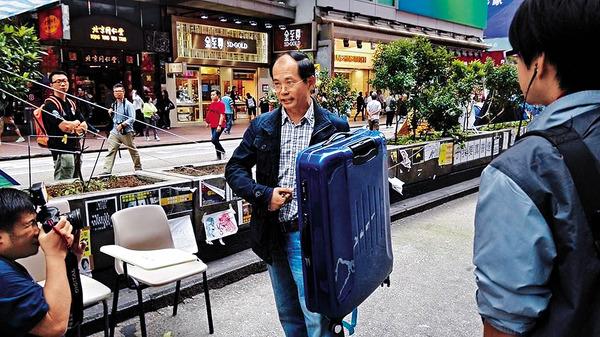
Here is a YouTube video
https://www.youtube.com/watch?v=fp9IkCrVXXQ in which someone has made a
cartoon off Wan Chin's demonstration on how to wield a shield that was made
out of a suitcase.

Nakade Hitsujiko and the "Reclaim the
intersection at midnight" sign.
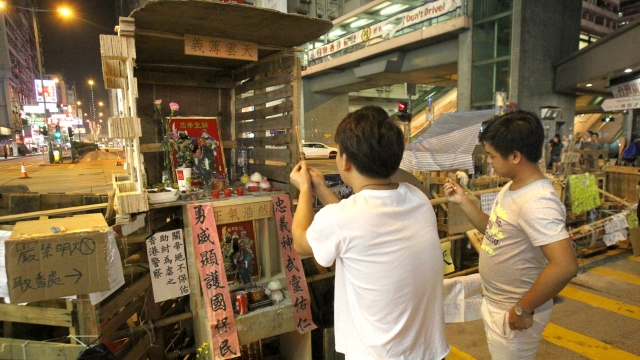
Lord Guan's altar in Mong Kok
I can only say that his group must be "saboteurs" of the
revolution.
His group has been soliciting donations.
Of course, they always say that they are looking for "reforms" instead of
"revolution" in order to get the suckers to hand over the money. They keep
fantasizing about the revolution, they fantasize that "the Chinese
Communists will destroy themselves and then Hong Kong will be saved," they
fantasize that "the gods and the ghosts will show up and rain disaster
upon the police trash." They have never done anything practical, nor have
they educated people about how to do it.
His group will turn out for the
"elections." Everybody knows that the Hong Kong electoral system is a
failure. Everybody knows that the District Council votes are bought by
offering small favors (snake banquets, vegetarian dinners, moon cakes, rice
dumplings) to grassroots folks. People got into resistance in the streets
because they know that the councils are failing and they want to have a
revolution.
To run in the elections, they need money.
The money has to come from their 'supporters'. Did their supporters give
their money thinking "I support your election effort" and "I hope that you
can bring in some reforms"?
So this is the case of the snake-oil
salesman!
Meanwhile Hong Kong Indigenous' Ray Wong
recently wrote that "if you want to fight with words, there are ways to
fight with words; if you want to fight with force, there are ways to fight
with force." He said that he was a rookie when he joined Hong Kong
Indigenous.
Well, I was the first one to point out
that when his organization first surfaced, they said "We are a group of
anonymous Hongkongers who stand on the foremost frontline in every battle
to defend Hong Kong" and "The previous resistance models are ineffective
against the Hong Kong Communist regime, so that we are compelled to stand
up and seek a breakthrough." But now he is slapping his own face with this
new essay. Isn't this fraudulent?
Think about it! How many persons believed
that his organization was "always been at the foremost frontline," "much
experienced," "use force to lead the way," "discard the old and establish
the new" etc, and then put in their efforts? When they show up, they ended
up being hit by police batons because of those "inexperienced rookies"?
Today, he said that he is reflecting and
therefore he can forget his previous fraudulent of claim of "valor" and
"experience" and toss himself into running for election. Isn't he awesome?
Obviously, someone is going to say that
we should get young people a chance, or that the City-State theory just
may
have some merits ...
Internet commentary won't destroy
something; it merely gives a direction for people to think some more
about. I want to say that while we know that the Leftist Retards are
clearly the enemy, you as a revolutionary should ponder whether this group has the same "ideas" as your "goals".
Do you think that their method will
succeed?
Do you think that they are always looking
for ways to succeed?
I think that you must think that
"revolution" is "easy" if you trust the Organization and you work hard
for that Organization.
Yes, this is is just like Communist
education.
(Wen
Wei Po) September 2, 2015.
Entrepreneur Yeung Kin-man has
donated $200 million to City University. Of these, $100 million is earmarked
for the School of Veterinary Science. Another $50 million is donated to found
a number of chair professorships in various schools and faculties. The
remaining $50 million will be used to subsidize City University students to go
overseas as exchange students. According to the strategic development plan,
65% of the City University will be able to go overseas as exchange students
between 2015-2020.
(Apple
Daily) September 7, 2015.
The invisible tycoon Yeung
Kin-man recently donated $200 million to City University. The university board
of directors voted by a majority to accept the donation, and planned to change
the name of the Academic Building (1) to the Yeung Kin-man Academic Building.
The university has not announced the matter. Our newspaper obtained
confidential documents of the university board of directors showing that half
of the donated amount will be used to support the School of Veterinary Science
and related biological and medical science course development.
This seems to be a regular donation, but it is
suspected of being a political gift. When CY Leung was the chairman of the
City University board of directors, he strongly supported the establishment
of a School of Veterinary Science but he was repeatedly defeated. Recently
City University wants to establish the school on its own by soliciting
donations amounting to $2 billion. By early this year, it had only managed
to procure $500 million. City University responded that $100 million was
allocated by Yeung to the School of Veterinary Science. As for the naming of
the building, the donation and its uses, everything followed the established
guidelines and procedures.
Yeung Kin-man is a low-keyed person who is in
the business of making mobile telephone monitor screens. It was a big change
in style to donate money to City University this time and have a building
named after him. In May this year, Yeung and other business people set up a
Happy Hong Kong Charity Foundation which has donated $30 million to the
pro-establishment camp for community work. Two of the Happy Hong Kong
Charity Foundation honorary sponsors are HKSAR Chief Executive CY Leung and
China Liaison Office director Zhang Xiao-ming.
(EJinsight)
September 9, 2015.
Students of the City University of Hong
Kong (CityU) urged the school administration to reject a HK$200 million
donation made by businessman Yeung Kin-man as they accused the entrepreneur
of exploiting his workers, Ming Pao Daily reported on Wednesday. The
donation is the largest the university has ever received.
Yeung is the founder and chief executive of
Biel Crystal Manufactory Ltd., one of the largest manufacturers of glass
covers and touchscreens for mobile phones. The companyÆs factories on the
mainland employ more than 100,000 workers. Its clients include Apple and
Samsung Electronics.
The CityU student union staged a protest
during the donation ceremony on Tuesday.
Cyrus Chu Kwok-chi, president of the
student union, had tried to submit petition letters to Yeung and Chief
Executive Leung Chun-ying, who is the university chancellor. However, Chu
was blocked and carried away by security guards at the venue. The union
expressed shock at the way Chu was treated, saying that he had received an
invitation letter to the ceremony.
Chu was sent to hospital after a
confrontation with security guards who blocked him from entering the venue
again. But a spokesperson for the university denied that Chu was manhandled
by security guards, noting that the student leader felt unwell because he
had been shouting at the venue for more than an hour.
In 2013 the Students and Scholars Against
Corporate Misbehaviour, a non-government organization that monitors
misconduct in work places, accused Biel Crystal of forcing 11-hour shifts
for seven days a week and giving workers only one day off each month. It
also said that at least five workers in the company have committed suicide
since 2011.
The newspaper failed to reach Yeung for
comments.
(Oriental
Daily, with video) September 8, 2015.

"Firmly refuse the blood-and-sweat donation
Give our City University its integrity back"
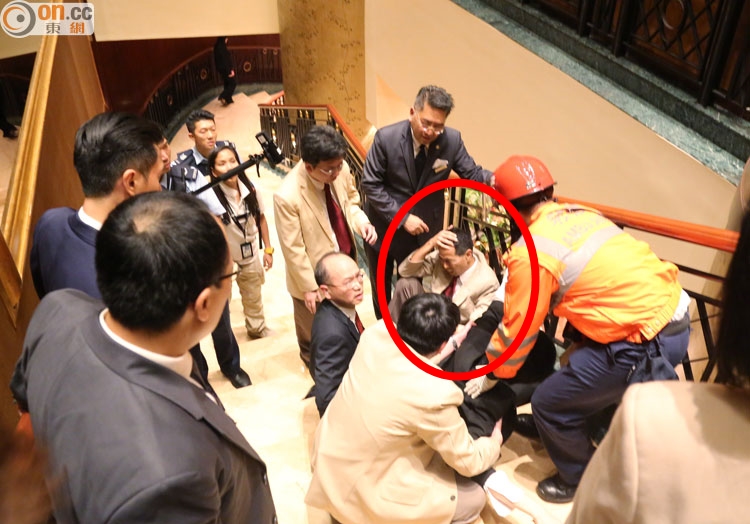
A security guard is injured
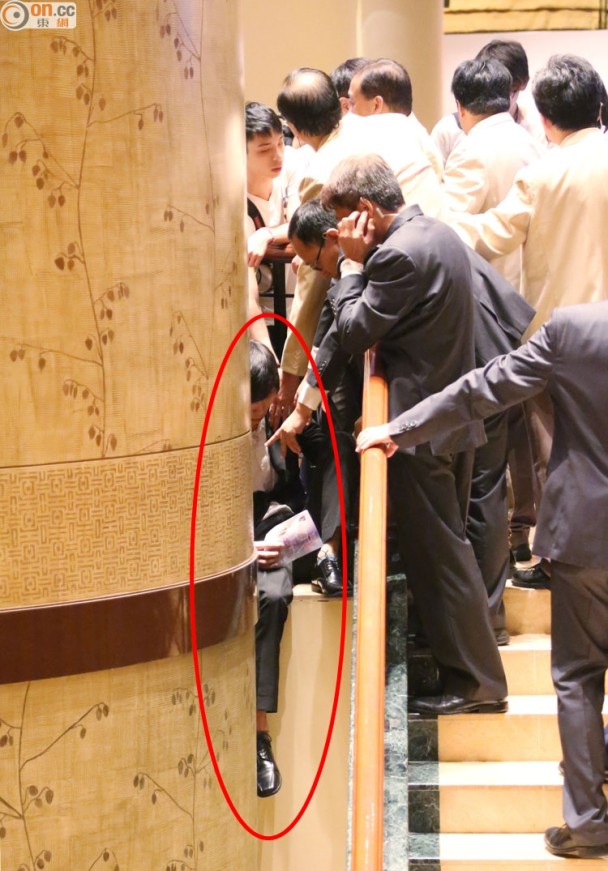
The City University board of directors'
community relations committee recently passed the motion to accept the $200
million contribution from businessman Yeung Kin-man. Yesterday there was an
acceptance ceremony at Conrad Hotel in Admiralty. More than a dozen students
stood outside, held up protest banners and chanted slogans. They said that
their Student Union president was inside and they were concerned about his
personal safety. The chaos went for 2 hours and stopped only when the
university board of directors chairman took a letter of petition from the
students.
When the students arrived to
protest, the police set up a protest zone outside the hotel. As the
demonstrators discussed whether to leave, the City University Student Union
president Cyrus Chu Kwok-chi was removed from the meeting. According to Chu, he
wanted to hand a letter to Chief Executive CY Leung during his speech, but
he was carried off by eight security guards as soon he stood up. He was
refused re-entry into the meeting hall. Chu demanded the university
authorities to give him a reasonable explanation. Meanwhile other students
tried to charge into the meeting hall. Chu tried to breach the security
guards by jumping down the standing room area by the stairway. Because his
action was dangerous, the fire department and the emergency medical service
were summoned. Chu laid on the stairwell and refused to be taken away.
Eventually, he was taken to Queen Mary Hospital to receive treatment.
A security guard claimed to be
hurt. He sat and looked pained, but he refused treatment. According to
information, he told the police that someone kicked him amidst the chaos.
The City University Student
Union suspects that there are political aims behind this sudden donation.
Accepting the money will destroy the autonomy of the university, including
personnel appointments. They demand that the university authorities reject
the donation from Yeung Kin-man as well as to cease and desist everything
that involves the naming of buildings and chair professorships.
Videos:
City Broadcasting Channel
Internet comments:
- I fully support the stopping
of all large-sum donations from celebrities (actually, Yeung Kin-man is barely
known in Hong Kong despite the size of his businesses) to universities. All
universities should be self-funded in order to maintain their integrity and
autonomy. They can work out their own destinies.
- I also support the stopping of all government subsidization of universities,
because CY Leung is the Chief Executive and head of that government. If the
university accepts money from the government (=CY Leung), we will all die (or something).
- The immediate consequence of stopping donations/subsidies is that tuition
fees will have to be raised through the roof. But that is okay, because it is
worth the price. We expect to pay that price in order to maintain our dignity
and
integrity.
- Of the $200 million, $50
million was designated by Yeung Kin-man to subsidize City University students
to go overseas as exchange students. The City University students will now
have to pay their own way in full to show us their dignity and integrity.
- City University Student Union president Cyrus Chu was accused in April 2015
of taking $30,000 from the Student Affairs Office so that he can go on an
exchange program to Japan along with his girlfriend. So Chu has made his
romantic trip
and he doesn't give a damn about anyone else hereafter.
- The City University administration has condemned the Student Union for
deliberately not mentioning the purpose of this $50 million.
- It is a strange idea that Yeung Kin-man
should put down $200 million in order to make CY Leung look good (or
something). There is plenty of other things that $200 million can be used
for, other than "make CY Leung look good." Here is an example: (Economic
Journal, 2014/12/08): The Land Registry said that units 36A and 36B
of Legend Tower, 7 Shing Yip Street, Kwun Tong with an area of 18,156 square
feet has been sold for $203,347,200 at a rate of $11,200 per square foot.
The buyer is Fu Tai Industrial Development Company Limited, whose director
is Yeung Kin-man.
-
"Firmly refuse the blood-and-sweat donation." Blood-and-sweat? The donor
Yeung Kin-man is in the business of manufacturing mobile phone touch
screens. (Economic
Journal) September 8, 2015.
You may be unfamiliar with the
name Yeung Kin-man, but you are likely to be very familiar with his company's
products. When you touch the screen on your mobile phone, that piece of glass
screen very likely came from his factories. Yeung factories in Shenzhen and
Weizhou accounts for one-third of all mobile phone screens in the world. His
clients include Apple (USA), Samsung (South Korea), Sony (Japan), Xiaomi and
Huawei (China). In addition, about 100 of the glass covers of the 30 million
luxury European watches are manufactured by his companies. He hires as many
110,000 employees. Recently he donated $200 million to City University to
support a School of Veterinary Science and other scientific research and
development as a way of promoting innovation ...
If you object to Yeung Kin-man
because he runs sweatshops, you should also object to Apple/Samsung/Sony/Xiaomi/Huawei
because they buy their screens from Yeung's sweatshops. Since that means you
can't post onto Facebook without your mobile phone, this is surely out of the
question for you.
- No, you can always use HTC because their screens are made in Taiwan. While
that wouldn't be hip, it would satisfy your conscience.
- Yeung
Kin-man is suspected of being a "689" (= Chief Executive CY Leung) lackey
because (1) he is involved in a certain Happy Hong Kong Charity Foundation
and (2) CY Leung is a honorary sponsor of the said charity foundation.
This is like saying that these City University
students should quit attending university in Hong Kong because, by virtue of being the
Chief Executive, CY Leung automatically becomes Chancellor of all eight
universities according to the university ordinances. If they insist on attending university in Hong Kong, they may
become brainwashed (or something).
- Why are the City University students
adamantly opposed to a School of Veterinary Science? Because this was what
CY Leung wanted when he was the chairman of the board of trustees at City
University. Since anything that CY Leung wants is bad, the school must be aborted
at all cost. Furthermore, while CY Leung couldn't get his way when he was
here, Yeung is now coming to complete it for him. So the project must
aborted at all cost. City University must never get a School of Veterinary
Science. I don't know why, but this just cannot be allowed to happen or else
we all die (or something).
- No, you won't die. It's just that many animals will die unnecessarily.
- Just an observation about the two hours of
chaos for the purpose of having a student handing over a petition to the
chairman of the university board of directors. An obvious question is: Why can't the students just
send it by post? Hehehe. You are missing the point! The students don't care about
the stinking letter either. Everybody knows that the letter will be filed in
the
circular bin. They only want the media taking pictures of them
handing some piece of paper or the other over to the chairman of the university's board of
trustees.
- Just a point about what happened to City
University Student Union president Cyrus Chu Kwok-chi. One report said: Chu wanted to
re-enter the meeting hall but was blocked by 8 security guards, so he tried
to jump down two stories. Then he laid down on the floor, refused to be
moved for an hour but eventually agreed to go to the hospital. Another
report said: A spokesperson for the university denied that Chu was
manhandled by security guards, noting that the student leader felt unwell
because he had been shouting at the top of his lungs at the venue for more than an hour. A third
report said: Chu was taken to the hospital because of a leg cramp. So the
total picture comes from the pieces.
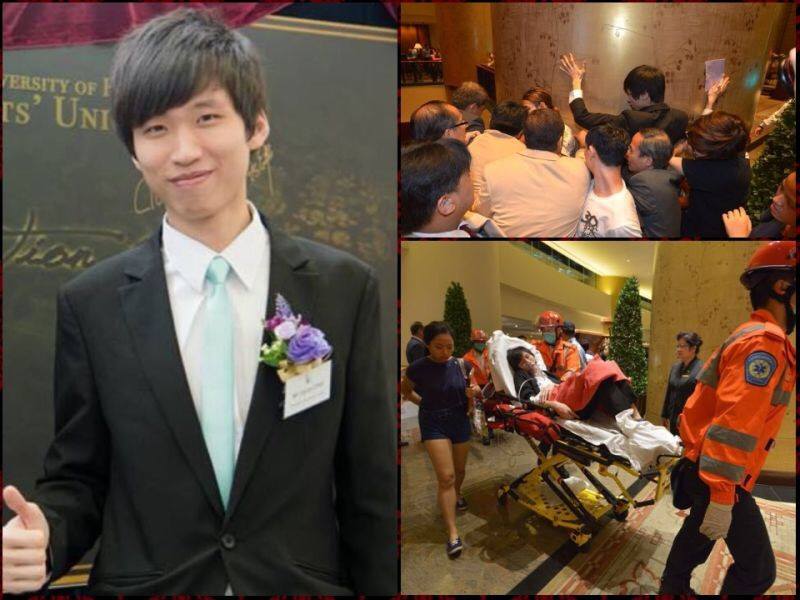
- City University has been in the news quite a
lot recently. For example, their O (Orientation) Camp brawl
https://www.youtube.com/watch?v=y67wP_zWJRw shows us that they've got
plenty of dignity and integrity.
-
When I got to the part about "The City University Student Union suspects
that there are political aims behind this sudden donation. Accepting the
money will destroy the autonomy of the university, including personnel
appointments" I almost choked to death. What about the sudden mysterious
donation of $1.4 million to Benny Tai which he re-routed to Occupy
Central-related projects? What about the clamor by politicians for the appointment of Johannes Chan to Pro
Vice Chancellor at Hong Kong University? It is as if they transplanted all the problems from Hong
Kong University to City University almost verbatim with only the names of
the individuals changed.
- No, the situations are different. In the case of City University, the
donation was offered to the university itself and the board of trustees
discussed and approved it. The university gave it maximum publicity by
holding a ceremony at the Conrad Hotel. In the case of Hong Kong University, the donation
went to Benny Tai and the university council found out only by reading the
Communist rags Wen
Wei Po/Ta Kung Pao much later. In summary, the first situation was against
Freedom/Democracy/Justice/Human Rights/Transparency/Rule of Law/Universal
Values
while the second situation was for Freedom/Democracy/Justice/Human
Rights/Transparency/Rule of Law/Universal Values.
- (Wen
Wei Po) Leung Hiu-yeung used to be the City University Student Union External Affairs
Secretary. He was kicked out of school last month due to failing grades, so
he is now an 'outsider.' On this day, he also stood dangerously outside the
two-storey-high stairwell just like Cyrus Chu. So City University now has
evidence of outside interference with the autonomy of the institution.
(SCMP)
Fifa has a cheek to lecture Hong Kong fans about booing China national anthem
- but they ought to heed the warning. James Porteous. July 19, 2015.
Two opaque bodies wielding immense global
power, riven with corruption allegations. Answerable to nobody, handing down
diktats with abandon. Billions of dollars sloshing around, making a skim
here and there irresistible to some. Transparency International, Amnesty and
similar organisations are not fans. Nor are the US and many other Western
governments - though they do have support from the likes of Qatar and
Russia.
Yup, Fifa and the Chinese
Communist Party have a lot in common - though China's governing body has
done more to improve life for the people they represent than football's.
Another thing the two august bodies have in
common, it seemed last week, is a clumsy determination to stoke protest in
Hong Kong by issuing heavy-handed proclamations.
Just as Beijing appeared hell-bent on
stoking passions during Occupy Central by barking orders, so Fifa might have
helped guarantee angry scenes from Hong Kong fans in their next World Cup
qualifier, against Qatar on September 8.
Fifa sent a letter at the start of the
month to the Hong Kong Football Association noting that "according to
information at our disposal, the fans of the representative team of Hong
Kong booed their national anthem" before the team's first two qualifiers in
June. Yes, our own anthem, not Bhutan's or the Maldives'.
"[We] would be left with no other option
than to impose sanctions against your association, should such incidents
recur," Fifa said. Predictably, when the HKFA revealed this and pleaded
(once more) with fans not to boo the March of the Volunteers again, fans
reacted furiously.
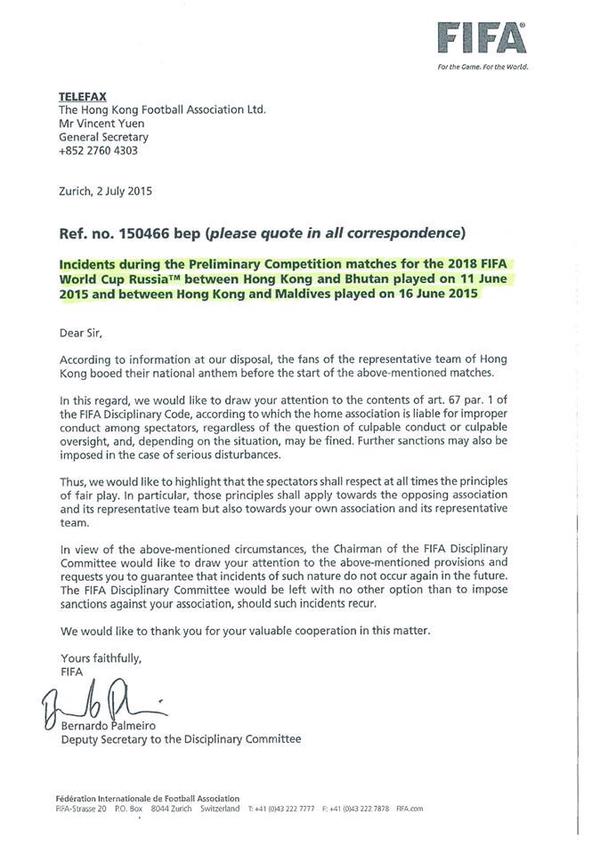
"How can you be punished for booing your own
national anthem?" was the gist of complaints, but Fifa's "principles of fair
play" apply not only towards opposing teams "but also towards your own
association and its representative team".
Who better than Fifa to say what's fair, of
course. This is the organisation that was compared to the mafia by US
Senator Richard Blumenthal during a Senate hearing last week into their
ongoing corruption crisis. He did backtrack: "[that was] almost insulting to
the mafia ... because the mafia would never have been so blatant, overt and
arrogant in its corruption," he clarified.
The same day, Transparency issued
recommendations on how to begin cleaning out the Augean Stables in Zurich.
Later, former vice-president Jeffrey Webb was on a plane to New York under
extradition to face corruption charges, one of 14 men indicted by the US
Justice Department. Then sponsors (finally) spoke out.
It wasn't all bad news: president Sepp
Blatter, absent in New Zealand and Canada for the Under-20 World Cup and
Women's World Cup, will be heading to Russia for the 2018 World Cup draw.
Nothing to do with Russia having no extradition treaty with the US.
You wonder how the mandarins can be
bothered to hammer minnows like Hong Kong, but life goes on for those of the
400 members of staff in Zurich whose time is not occupied by paper-shredding
and panicked telephone conversations with expensive lawyers.
We asked Fifa: who reported the booing
(presumably the match delegate, but who knows); has a team been punished
before for such a "crime" (the Spanish government made unhappy noises when
Basque and Catalan fans booed Spain's national anthem ahead of the King's
Cup final between Athletic Bilbao and Barcelona recently, but no punishment
seems to have been made); and what might happen if the March of the
Volunteers is raspberried again?
After an initial meaningless statement
confirming the warning, they sort of answered: "cannot comment à cannot
confirm ... cannot comment". Thanks. We had to laugh when Fifa's
ultra-oxymoronic ethics committee proclaimed the very same day that "more
transparency" was needed.
What is transparent is that the HKFA will
be very worried. Hong Kong Stadium still has not been approved by the
government for the qualifier against China in November, sure to be a testy
affair.
"High-level talks" are ongoing, we
understand, with the government believed to be worried about 40,000 fans
seeing the game as an ideal opportunity to rile the mainland.
It could even be played behind closed doors
if there's more booing at the Qatar match - which would likely be a relief
for the Hong Kong government as it would help them avoid a tricky decision.
So, much as it sticks in the craw to take
advice on manners from Fifa, let's hope fans hold their tongues in
September.
(SCMP)
September 8, 2015.
James Porteous: Hmmm ... some
fairly loud booing for China's national anthem for 30 seconds before other
fans tried to drown it out with applause - could Hong Kong be facing
punishment from Fifa for that, having been warned?
...
The China national anthem was booed before
kickoff again, for perhaps 30 seconds before being drowned out by applause
from fans realising the potential repercussions - HK could face playing
games behind closed doors, or be docked points by FIFA.
(Apple
Daily, with video) September 8, 2015.
When the national anthem came
on, many fans in the stand clapped and booed, with some of them shouting "We
are Hong Kong" to drown out the national anthem. TVB used to broadcast the
national anthem part, but they did not have a live broadcast this time.
In June this year, the Hong Kong team won its
home matches against Bhutan and Maldives. However, some Hong Kong fans booed
their own national anthem. In July this year, the Hong Kong Football
Association received a letter from FIFA that if such improper conduct were
to appear again in future matches, appropriate penalties will be imposed,
ranging from closed door matches, forfeiture of matches, points deduction or
even expulsion from the World Cup.
(Oriental
Daily, with video) September 8, 2015.
When the national anthem began,
the Power of Hong Kong core members were very restrained and did not boo. They
even called for the fans around them not to boo. But fans in others parts of
the stadium booed aloud. Some fans began to sing to the national anthem in an
attempt to drown out the booing. But the booing was louder. Some fans turned
their backs to the playing field in a display of their attitudes. TVB News
Channel broadcast the singing of the national anthem, but the TVB J2 channel
which broadcast the full match live did not broadcast this part.
(SCMP)
September 19, 2015.
Soccer boss Brian Leung Hung-tak is hoping
the Hong Kong Football Association's "sincere efforts" to curb fan
misconduct will result, at worst, in a light punishment from Fifa after a
lemon-tea throwing incident in a World Cup qualifier came to light
yesterday.
The Hong Kong Football Association is
facing a ôpotentially damaging situationö after it emerged a fan threw an
object at a Qatar player during the World Cup qualifier at Mong Kok Stadium
last week. The HKFA is already trying to limit the damage of another case of
fans booing the Chinese national anthem before the game, which Hong Kong
lost 3-2 on Tuesday, September 8.
ôIt is regrettable that despite continuous
pleas for fans to behave themselves, it appears that the behaviour of a
small minority of fans has placed the HKFA in this potentially damaging
situation,ö said chief executive Mark Sutcliffe on Friday. ôThe HKFA has
received correspondence from Fifa announcing that disciplinary proceedings
have been opened against the HKFA in relation to incidents that took place
during the recent Hong Kong v Qatar match. The first incident referred to
concerns one of the Hong Kong fans throwing a small box [a paper tetra pack
250ml with lemon tea] on to the field of play aimed deliberately at player
number 10 of Qatar. The second incident is the booing of the Hong Kong
national anthem by some of the Hong Kong fans,ö Sutcliffe said. ôThe letter
states that these two incidents appear to be a violation of the Fifa
regulations [article 65ff of the Fifa disciplinary code] and the Fifa
stadium safety and security regulations.ö
The HKFA has until September 22 to provide
relevant information to Fifa which will be considered together with all
other available evidence at the next meeting of the Fifa disciplinary
committee to decide if any action should be taken. Possible sanctions could
include having to play the next home qualifier, which would be against China
in November, behind closed doors.
HKFA chairman Brian Leung Hung-tak said he
hoped his bodyÆs "sincere efforts" to prevent fans from booing the anthem
would result, at worst, in a light punishment. ôRight now we are gathering
information to show Fifa that we truly asked fans not to boo the national
anthem. We hope this will show Fifa that we did our best,ö said Leung. As
for the box-throwing incident, Leung said: ôFifaÆs evidence is sound and a
fine is expected. They took a picture of the drink box. It took place in the
60th minute.ö
Fifa had already warned the HKFA after fans
jeered during their World Cup qualifiers against Bhutan and Maldives in
June, prompting Leung to make a special appeal to the supporters.
Videos:
Ellis Kwong Wai Kwan
Part 1
https://www.youtube.com/watch?v=Gfe6HWJFJ5o
Part 2
https://www.youtube.com/watch?v=DyQxNBpfNmg
Part 3
https://www.youtube.com/watch?v=sikF0qSgE0w
YouTube
Spoiling
the Spanish anthem
Internet comments:
- Apple Daily reported that TVB
did not broadcast the national anthem part. According to Oriental Daily, TVB
J2 which aired the whole match live did not show the national anthem part, but
the TVB News Channel (and the TVB Jade late night news report) both aired
the national anthem part. What is the difference? The TVB J2 live match
broadcast would be seen in mainland China, and thus do even more damage to
Hong Kong tourism/retail/hospitality industries. But the people of Hong Kong
can watch their local news and see what some of their people are trying to do here.
- Here is the Hong Kong team: Yapp
Hung-fai; Jack Sealy, Festut Baise, Jean Kilama, Cheung Kin-fung;
Bai He, Huang Yang; Lo Kwan-yee, Lam Kaw-wai, Jaime McKee;
Chan Siu-ki. Those five names in bold are homegrown players, and the
other six players hail from elsewhere (the two defensive midfielders are
from mainland China). So what is there for the Hong Kong localists to cheer
about? Why are the Labour Party's legislators not complaining about Hong Kong-born
footballers being
deprived of employment opportunities?
- Maybe you argue that anyone who has lived continuously in Hong Kong for
seven years, earned the right of abode and applied for 3 stars on their Hong Kong
ID is a Hongkonger regardless of their origins. Except the localists won't
accept this argument if that person came from the mainland. So a middle-aged
Chinese female may have three stars on her Hong Kong ID, but she is
still a mainland vermin/louse who must not be allowed to sing/dance in
public.
- The booing is a microcosm of Occupy Central
versus Valiant Warriors. Occupy Central wanted the central government to
make concessions and therefore negotiations are needed; the Valiant Warriors
think that only valiant resistance can bring down the Chinese Communists and
no compromise should ever be made. So in like manner, the Power of Hong Kong
group did not boo and they asked others not to boo because of the potential FIFA
sanctions; the Valiant Warriors think that only valiant booing can bring
down the Chinese Communists and no compromise should ever be made.
- If the next home match against
China is turned into a closed-door affair, Hong Kong's valiant localists
warriors will go and beat up Sepp Blõtter/Michel Platini.
- In Europe, law-breaking fans are identified and banned from matches. The
Hong Kong boo'ers have failed to take the standard tactic of wearing masks to avoid
identification.
- Since
Hong Kong fans were booing their own national anthem instead of their
opponents' national anthem, the penalty should be less.
- You misunderstood the reasoning. The penalty is really for injecting
politics into soccer by whatever form or means. If you want to play politics, do it
elsewhere; you have plenty of other opportunities.
- This is pathetic. The last match was against
China in Shenzhen, and there was no booing from the 2,000 Hong Kong fans.
They were too intimidated by photos of the Chinese armed police with police
canines drilling
beforehand
in the stadium. If you get arrested for disorderly conduct in public on
mainland China, it is 15
days of administrative detention without any means of appeal. P.S. Bring
your own toothbrush because the detention centre does not supply it.
- In Hong Kong, we have the notion of a "watch dog" (門口狗).
This is a guard dog at the entrance. When the dog is on its home turf and spots a stranger,
it will bark and yelp loudly to intimidate. When you take the dog outside
for a walk, it will droop its head and whimper lamely because it is scared
silly by the outside world.
- It is the Hong Kong soccer fans who
have no manners, not Hong Kong fans in general. Hong Kong fans don't create
any problems with the Chinese Women's volleyball team (now world champions) or
the Chinese diving team.
- Support the Hong Kong team = Boo the national anthem. What a brain-damaged
idea!
- What is for certain that those booed do not love Hong Kong. FIFA had
issued their warning already. These fans won't mind if the Hong Kong team
gets penalized. They don't love Hong Kong.
-
人必自侮,然後人侮之;家必自毀,而後人毀之;國必自伐,而後人伐之。
There is saying in Chinese: "A person
must debase himself first before others debase him; a family must ruin itself
first before others ruin it; a nation must destroy itself first before
others destroy it."
-
What do you think the Hong Kong national anthem should be? My vote is George
Lam's
Love
You Until I Am Feverish. It is usually sung with an alternate set of
lyrics to Love You Until I Eat Bananas.
- All these cost-benefit analyses are missing
the point. The only thing that mattered to the perpetrators is that they
feel good. That is all they care about. Just like the Umbrella
Revolutionaries/Shopping Revolutionaries/Reclaim Revolutionaries.
- Want war? Got real war! See
Football War.
- The Internet says that it is unlikely that
FIFA will impose penalties. Ignoring the question of whether you can trust
the Internet, let it be said that if no penalties are imposed, then FIFA is
encouraging the Yellow Ribbons to cause greater trouble in the next game when Hong
Kong hosts China. That may be a good (or bad) thing, because a major incident may
cause Hong Kong to be expelled from the tournament altogether.
(Oriental
Daily) September 7, 2015.
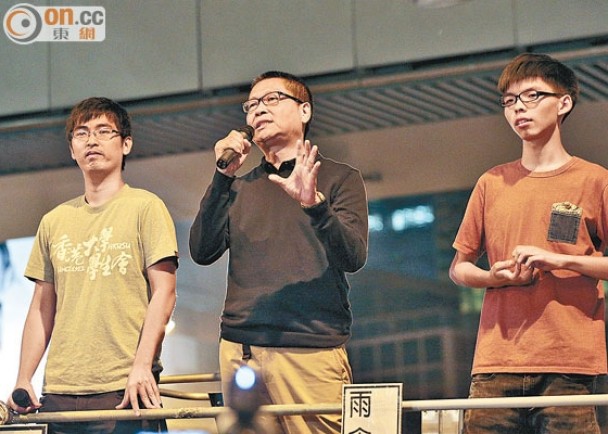
Alex Chow (Federation of Students), Chan Kin-man
(Occupy Central Trio), Joshua Wong (Scholarism)
September will be the anniversary of the
Occupy Movement. At a forum today, Chan Kin-man (Occupy Central), Alex Chow
(former secretary-general of the Hong Kong Federation of Students) and
Joshua Wong (Scholarism convener) all agreed that the Occupy Movement did
not force the Central Government to rescind the 831 resolution and did not
obtain universal suffrage for the people of Hong Kong. They acknowledged
that all the efforts went for naught. Furthermore, Chan Kin-man said that
the moderate pan-democrats have rebelled so as to impact the support for
pan-democrats in the District Council and Legislative Council elections.
It is noticeable that no pan-democrat
legislative councilor participated in the forum today. Could it be that they
are disavowing the Occupy Movement at a time when the District Council
elections are coming up?
The Occupy Movement moved ahead of schedule
after the so-called 926 charge into the east wing of Government
Headquarters, which is sometimes referred to as Civic Plaza. Chan Kin-man
acknowledged that a pessimistic view of the Occupy Movement was that its
greatest failure is the failure to obtain genuine universal suffrage. It
also firmed up the hard-line stance of the pro-establishment camp and it
caused the democracy movement to become even more constricted. So this seems
to be a total defeat. Chan also said that the Occupy Movement caused certain
moderate pan-democrats to switch sides, such that the support level for the
pan-democrats have fallen from 60% to 40%. This means that the moderate
pan-democratic candidates will be staring into a crisis in the upcoming
elections.
But Chan
Kin-man said that all has not been lost because the remaining 40% will be a
"critical minority." Why did the movement seemed rudderless in its final
stages? Chan said that most citizens regard the students as the movement
leaders and therefore the Occupy Trio could not change the students'
decisions. Does that mean that the students should be blamed for the failure
of the movement?
At the
forum, Joshua Wong acknowledged that the decision-making structure was
undemocratic and that there was lack of democracy within the movement. For
example, the Hong Kong Federation of Students had more than half of the
votes in the five-party platform (consisting of the Hong Kong
Federation of Students, Scholarism, Occupy Central, the pan-democratic
legislative and the civil groups). So even if Occupy Central and Scholarism
agree on something, it won't go through if the Federation of Students
disagrees. In other words, Joshua Wong criticized the leadership of the
Federation of Students.
Meanwhile Alex Chow said that they could not resolve the internal
contradictions of civic society and therefore nothing can be accomplished
without the trust. He said that the students initiated the escalation
without consultation. The tragedy of the student movement was that they had
no more cards to play or they played whatever cards they could without
justification. Chow said that it takes 40 years to develop students
movements elsewhere, so this means that large-scale movements will have to
keep going indefinitely.
But the best move came from the pan-democratic
political parties. Not a single pan-democratic legislator showed up for this
forum. During the Occupy period, these people showed up regularly to offer
support. Could it be that the elections are more important now, and the
pan-democrats want to maintain a "safe distance" away from the anniversary
of Occupy Central?
(InMediaHK)
September 3, 2015.
Alex Chow said that the Umbrella
Movement was a landmark in political culture and the democracy movement. It
exposed the mutual distrust within the civilian sector. Many of the decisions
made by the Occupy Movement leadership (such as deliberations and voting) were
controversial, and bred more distrust.
Alex Chow said that most of the decisions were
made by the Occupy Central Trio, the Federation of Students, Scholarism and
the civil groups. In Hong Kong, citizens do not trust groups. Under this type of
decision-making structure, citizens won't understand or support the
decisions, and the decision-makers need to have superhuman abilities to deal
with all the political issues.
Alex Chow said that the civil society
continued business as usual during the Umbrella Movement, which means that
the organizers have no cards to play. Even after 9/28, the civil society did
not start a non-cooperation movement, as there were no labor strikes, no
business strikes and no school strikes. Public servants, teachers and the
communities continued to work/function normally. When civil society cooperates with the
government, there are no cards left to play. Meanwhile the pressure grew,
anxiety grew, discontent grew and dialogues reached dead ends. Chow said
that every card played was ineffective, the options became fewer and
clearance was coming up. Thus came the tragedy of Lung Wo Road on November
30, 2014.
Alex Chow said
that the everyday politics of civil society in Hong Kong does not practice
the democracy movement. Even if a more large-scale movement were to take
place in the future, it is still doomed to defeat. "The Umbrella Movement is
the result, not the cause, of our everyday politics over the past
several decades. If we keep thinking the same way, any future movement is
doomed to fail. The only way to break through is to hope for the government
to make a mistake. Is that what our strategy will be?"
Alex Chow also mentioned the
university students voting to withdraw from the Hong Kong Federation of
Students. He said that this is quite similar to the Umbrella Movement.
Students are still electing representatives to handle all the affairs. This
means that the student movements are like the April 5 movement -- namely four
or five representatives doing everything for them. Students only think that
their job is supervise the elected officers without having to participate
themselves. This type of thinking restricts the power of civil society and
stalls the student movements.
(InMediaHK)
September 3, 2015.
Legislative councilor Leung
Kwok-hung said that the Umbrella Movement was not a revolution. The foreign
correspondents were merely hyping things up. He said that if we think that
this was a revolution, then we don't understand ourselves too well. However,
this is being defined not as a revolution because we want to decide whether we
want a revolution sometime in the future.
Leung said that the word revolution refers to
something irreversible, such as the Copernican Revolution. There has
been no narrative for the Umbrella Revolution. Nobody in Hong Kong wants a
revolution. The Umbrella "Revolution" evolved from the Occupy Movement,
which is not a revolution in itself.
In retrospect, the Umbrella Movement kept
lowering its demands for universal suffrage in order not to clash with the
government. This proves that the Umbrella Movement was not a revolution.
There was a referendum that included three options all of which included
civil nomination. Benny Tai thought that the three options were not
moderate. The design of the Occupy Central movement was to have middle-class
citizens and intellectuals make some sacrifices and call on the people of
Hong Kong to come forth. Therefore Benny Tai attached 12 other options that
met international standards for the Chinese Communists to pick. The Chinese
Communists refused to accept any. This forced the Hong Kong people to take
action. If the Chinese Communists had accepted any one option, the Umbrella
Movement would never take place. Therefore 9/28 happened in order to stop the
counter-revolution, not to start a revolution.
According to Lenin on revolution, there should
be a set of guiding principles, organization, propaganda and mobilization.
However, the Hong Kong democracy movement does not even have a narrative.
...
On reaching out to the local communities,
Leung said that the point is not so much about going into the communities as
about what you do out there. Leung said: "I have lots of friends who play
soccer with me, but they ignore my politics." He says that before going into
the local communities, you need to resolve the problems of the Umbrella
Movement and the democracy movement first. Otherwise you have nothing to
talk to people about.
"The mistake in the Umbrella Movement was that we were too optimistic." He
said that we couldn't stick to non-violence during the movement and we
couldn't force our enemies not to use violence against us. In the five-party
platform, none of the parties dared to make the decision to attack
Government Headquarters. That would have been a grave decision. In his own
case, Leung did not make any proposal between September 28 and October 2.
In mid-October, the Blue Ribbons began to
interceded violently. This effectively curtailed the mobilization of the
Umbrella Movement. "The Communists were really crafty." The movement was now
doomed to shrink. The presence of the Blue Ribbons meant that we could not
concentrate on the government. Afterwards, "when you talk, you get cursed
out; when you get beaten up, you don't even understand why; the civil
disobedience campaign became more and more distant."
(InMediaHK)
September 3, 2015.
Joshua Wong said that the
Umbrella Movement did not fail; it merely failed to achieve anything. He said
that the five-party platform merely meant that each party said whatever they
want to say. So the pan-democrats and the Occupy Central trio were not
interested in more escalations. This meant that the platform was led by the
students. Nobody thought about how to incorporate the localists and newbies
into platform.
Joshua Wong
said that they held meetings day and night, "with dozens of reporters
waiting for us to come out." He said that the students never thought about
withdrawing whereas the pan-democrats and Occupy Central trio do not want
any escalation. This meant that there is a political tussle within the
platform. "They each have their say" and "nothing was ever resolved."
In the National Education campaign of 2012,
more than twenty organizations took part but only three of them really made
the decisions. When Scholarism thought that they had won and wanted to
withdraw, some people surrounded them and demanded explanations. What
Scholarism did was to remove all the microphones. So that was a
top-to-bottom decision.
Joshua Wong said that the ideal social movement should be run bottom-to-top.
In Malaysia and Taiwan, the student movements were run top-to-bottom. In
theory, every movement is initiated by an organization. The point is that
the organization must be democratized. At Scholarism, volunteers or members
will sometimes question why decisions were made without consultation. At
the Federation of Students, they couldn't consult all the member
universities all the time.
Joshua Wong said that even before the Umbrella
Movement, some people were accusing the "leftist retards" for "betraying Hong
Kong. During the Umbrella Movement, some localists challenged the decisions
made by the Grand Stage. The localists and the newbies were not incorporated
into the decision-making process. These people came into the movement in
ways that do not conform to the traditional model. Traditionally, students
participate in student unions in school and then graduate to join NGO's etc.
The localists and newbies do not come this way. In the latter stages of the
Umbrella Movement, 30% to 40% of the participants were either localists or
newbies. Therefore future movements must think about how to incorporate them
into the decision-making process.
(EJinsight)
Why Jimmy Lai thinks student leaders are arrogant and foolish. September 10,
2015.
It must have been tough for Jimmy Lai to
openly criticize the student leaders of last yearÆs protests for being
ôarrogantö and ôfoolishö.
The media maverick, who stood in the
frontline of the pro-democracy movement, said the students ignored their
elders in the Occupy Central movement when the latter called for a retreat
two months after the street occupation began. ôThe way they treated the
Occupy Central founders could not be worse,ö Lai said.
He was reflecting on the movement in an
interview with his own weekly magazine ahead of the anniversary of the
protests.
He compared the students to people who
finish a messy meal and leave everyone else to clean up after them. ôThey
were late for meetings, not just two minutes but an hour or more,ö he said.
ôWhen they called a meeting, they wanted us to be there right away. But they
came only when everyone else had arrived.ö
LaiÆs frank revelations were carried by
pro-establishment newspapers which earlier accused him of shirking
responsibility for his role as a financier of the 79-day movement. They also
highlighted a deepening generational conflict ù post 1950s activists against
their post 1990s counterparts.
The difference in strategy between Occupy
Central on one hand and the Hong Kong Federation of Students (HKFS) and
Scholarism on the other emerged in November when the former tried to
persuade the latter to withdraw from the streets and save their energy for
the next phase of the movement. But the students wanted more radical
measures, knowing they had the support of the wider population.
At one point, the students pressed lawmaker
Albert Ho to quit in order to trigger a by-election and proxy referendum on
political reform. Ho announced he was going to resign in January but the
move fizzled after it got a cold shoulder from the public. Lai described it
as ôcrazy, foolish and irresponsibleö.
He was no less unforgiving toward student
leaders Alex Chow and Joshua Wong, whom he condemned for not having respect
for veterans like him and others. Chow disappeared from the limelight after
the protests ended, yielding to Nathan Law as HKFS secretary general. Wong,
Time magazineÆs No. 3 candidate for 2014 Person of the Year, has an active
media presence, especially in LaiÆs publications.
It was not the first time Lai had been
critical of the student leaders. He seriously disagreed with their decision
to hold out until they got concessions from the government which never came.
To be fair, the students had run out of
energy and their inability to show up on time at important appointments
should not be taken too seriously.
ItÆs no secret that Chief Secretary Carrie
Lam is no fan of Joshua Wong, who often publicly embarrassed her without
giving her a chance to reply. But Lam showed her soft power by appearing to
win over Alex Chow in their first and only meeting during the protests.
IÆm sure there will be more details when
people come out with their own version of events. We think LaiÆs grumbling
is only the beginning.
(Commercial
Radio) September 15, 2015.
Hong Kong Federation of Students
secretary-general Nathan Law and Scholarism convener Joshua Wong admitted
that the Occupy movement achieved "zero results" with respect to the
constitutional reform. However, the Occupy movement became the Enlightenment
for a new generation. Nathan Law felt bad because the students called for an
escalation which led to many Occupy participants to be injured and arrested.
Joshua Wong said that the Occupy movement was besieged internally and
externally in the latter stages and he felt pressured from both sides.
Both thought that there are no pressing
issues with which to mobilize the people after the veto of the
constitutional reform. Nathan Law said that the Hong Kong Federation of
Students is focusing on issues related to higher education, while Joshua
Wong said that Scholarism will hold a meeting to discuss future directions
towards realizing universal suffrage.
(Hong
Kong Free Press) Occupy co-founder Benny Tai says he regrets not
ending protests sooner. September 18, 2015.
Last yearÆs pro-democracy Occupy protests
should have ended sooner, a key figure in the movement admitted on Thursday.
Occupy Central with Peace and Love (OCPL) co-founded Benny Tai Yiu-ting told
RTHK that civil disobedience actions require public support, and that if he
had ended Occupy sooner it would not have drained so much energy from Hong
Kong civil society.
Tai, also an associate professor of law and
the University of Hong Kong, told the broadcaster that it will take time for
society to recover from the drain and he regrets not drawing the movement to
an end sooner. However, he does not regret fighting for genuine universal
suffrage through the civil disobedience movement.
Tai also said that the protest achieved
more than he had expected in terms of civil awakening, although it did not
succeed in reforming the political system. Tai, comparing Hong KongÆs
prospects for political reform and the legal implications he might face to
ôwalking into a dark tunnel,ö said he will not stand in the front line of
pro-democracy protests again. Instead, he would prefer to serve as a point
of connection between different parties as they seek a new path to political
reform.
Fellow Occupy Central co-founder Dr Chan
Kin-man told RTHK of differences he had with students protest leaders during
the groupÆs 79-day occupation of Admiralty.
Chan, an associate professor of Sociology
at the Chinese University of Hong Kong, said he did not agree with attempts
to surround the Central Government Complex and impede regular operations,
thereby increasing pressure on the government. Should these actions result
in a toppling of the government, Chan said it would have provided an excuse
for the PeopleÆs Liberation Army to become involved.
Whilst Chan said that he understood
students would not leave until they achieved genuine universal suffrage, he
asked young people to reflect on when it is best to fight and when it is
best to communicate with the government.
Although Chan made frequent trips to the
mainland over the past 20 years to conduct academic research, he has acted
the advise of mainland friends and has not crossed the border since the
Occupy movement was launched.
(HKG
Pao) September 20, 2015.
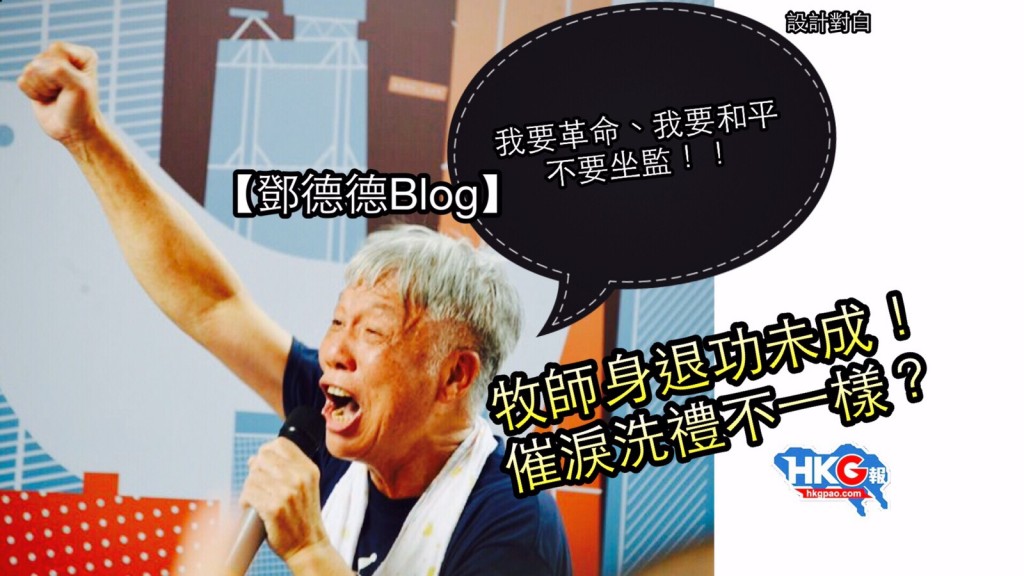
Caption: Occupy Central Trio member Chu
Yiu-ming: "I want revolution, I want peace, I
don't want to go to jail!!"
Occupy Central Trio member Reverend Chu
Yiu-ming was interviewed about the one year anniversary of Occupy Central.
Chiu said that he was criticized by other church pastors for betraying his
faith, but he used the fact that Occupy Central ended peacefully in
rebuttal. Reverend Chu probably forgot that even though there were no
casualties in the streets, the mental and economic damage to citizens was
tremendous. And after the "peace," the social rift will have a much deeper
impact.
In truth, the demonstrators did not achieve
peace themselves. In the Occupy areas, there were a lot of thefts, sectarian
clashes, damage of public property and even surrounding police cars, topping
barricades and constructing barbed obstacles and other unpeaceful things.
The reason why there was no large-scale clash was because the police acted
in restraint and the citizens endured things quietly. For Chu to have the
chutzpah to credit himself, isn't he lacking in the attribute of humility in
Christianity?
Chu Yiu-ming said that his health is
failing and he has been in and out of hospitals many times since Occupy
Central started. So at the age of 70, he doesn't know if he will be
prosecuted and sent to jail. He seemed to be rallying public opinion to get
himself out of jail. Didn't the Occupy Central Trio said initially that they
will quietly let the rule of law takes its course, that they will not resist
and they will be sentenced without protest? But now we see the Occupy
Central trio coming up with individual reasons why they should be able to
stay above the fray. How can the masses gain victory when they have
perfidious leaders like these?
Chu said, "The younger generation will
never be the same after the baptism of tear gas." He is right. The tear gas
caused the young people to become rebellious and released a Pandora's box of
Shopping Revolutionary, Hong Kong independence, destruction of rule-of-law
and contempt to the law. Furthermore the silent majority also saw that
street violence is even more evil than tear gas. So we must counter-attack,
disband Occupy Central and put the Yellow Ribbons to the law.
(South
China Morning Post) September 1, 2015.
In 2009, the former Diocesan GirlsÆ School
student talked to the press after she scored 10 As in the Hong Kong
Certificate of Education Examinations (HKCEE). Mak told reporters at the
time that she would like to become a politician and even the Hong Kong chief
executive one day. ôI want to become an influential [person], not only for
the pay,ö she said at the time. When asked again in the interview, Mak said:
ô[This will be] something in æNÆ years. It is hard to know.ö
(South
China Morning Post) September 7, 2015.
She may be a beauty queen with a Cambridge
law degree who expressed interest in being a political leader, but one dream
is too big for Louisa Mak Ming-sze û moving out of her family home.
ôIf I wanted to move out of my parentsÆ
home, I would have a lot of issues financially,ö the new Miss Hong Kong said
in an exclusive interview with the South China Morning Post. ôI do feel
strongly about it because a lot of my friends recently graduated, got jobs
and want some freedom from their parents and are unable to get anywhere to
sleep.ö
The 23-year-old said the cityÆs soaring
property prices had left young people unable to chase their true vocations
and instead chasing high-paying jobs in sectors like finance and medicine.
ôIf you donÆt even have a place to sleep, how can you talk about dreams and
aspirations?ö
And Mak û who, after achieving top grades
in her school exams in 2009 told the media that she was interested in
becoming a politician û said tackling the problem would mean taking on
vested interests, including homeowners as well as big business.
ôThatÆs why us Hong Kong people have to be
united à and try to think how we can go forward with the interests of the
bigger society in mind. No one wants the price of their own house to go
down. But we must realise that this is a very immediate issue. ItÆs
affecting a lot of the younger generation.ö
But Mak also sees a need for the city to
strengthen its legal and social systems to prevent ôthe tyranny of the
majorityö as it moves towards democracy. She said comments by Chief
Executive Leung Chun-ying during last yearÆs Occupy protests û that poor
people would dominate in a full democracy û were not a ônovel ideaö.
ôWhen the majority can decide everything,
then there may be unjust results,ö she said. ôPeople like to quote the Nazi
regime, though itÆs a bit confusing because whether they were the majority
is still debatable à But I do take the point that democracy in itself is not
enough, because when the majority can make decisions, then they can suppress
those in the minority. ThatÆs why we need protection from the legal system.ö
She said there was still a lot of
discrimination in Hong KongÆs legal system and society, which needed to be
improved through education and other means. ôItÆs always time [for Hong Kong
to have democracy], but whether itÆs feasible is another issue,ö she said.
She would not comment on whether it was feasible, saying instead: ôWe are
trying to [realise democracy]. ThatÆs what we are all aiming for at the
moment.ö
(South
China Morning Post) September 7, 2015.
She may be better known as a beauty queen,
but as a straight-A student and Cambridge law graduate, the new Miss Hong
Kong has strong ideas on what she would do if she were to become the city's
leader - including tackling vested interests to cut inflated housing costs.
"If I were the chief executive, I would
definitely want housing to be affordable," said Louisa Mak Ming-sze, who,
after gaining a perfect score in the Hong Kong Certificate of Education
Examination in 2009, said she wanted to enter politics and even become chief
executive one day.
The 23-year-old said she understood the
difficulties in making housing more affordable, particularly because of
vested interests, which included not only businesses but also individual
property owners.
She said every policy would inevitably
affect some interests, leading to some people losing. She said if she was
chief executive, she would make sure that the majority was winning. "There
is not going to be a policy where everyone is going to be happy. And that's
why it's difficult, and I'm not confident enough in myself."
Perhaps this is why the new Miss Hong Kong,
although she sounded certain that she wanted to be a politician back in
2009, is now not so sure about this path any more.
She said there were constraints on the road
of politics that she did not expect when she was younger, such as power
struggles and financial requirements.
"There is this thing about being
politically correct. I myself have always tried to be correct, but not
politically correct. I need to know whether I have the capabilities to serve
society in that role, because I learned that it takes much more than simply
caring about society."
Mak said she was open to different options,
including performing, because she is passionate about dancing and drama.
"I realise that the media is a very
powerful influencer à When I was doing some drama productions at university,
I found it a very satisfying experience to be able to send out messages, but
through someone else's mouth. I am looking forward to bringing some new
content to the media, if I am able to."
Being an "influencer" has been Mak's dream
since she was little. Last year, she interned at Sing Tao Daily for
four months as a feature writer to "send messages out there and to voice
your opinions à indirectly", while "pretending to be neutral".
At about the same time, she posted a photo
on her Instagram account showing her in the middle of the pro-democracy
Occupy protests.
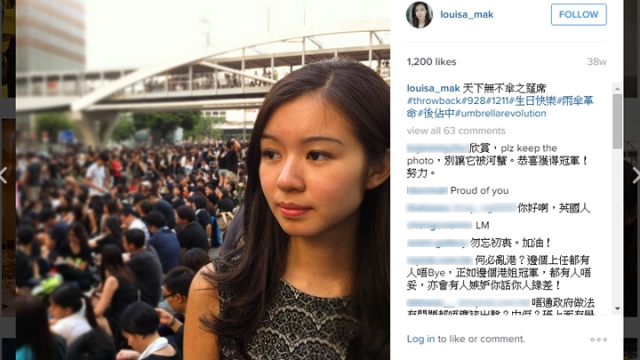
"I appreciated the movement because it
really made us think. Some people were very for it and some people were very
against it, but I think it's that clash that will inspire us to think. It
was beneficial to Hong Kong because we finally saw people with passion for
society. On a social level, I think it really allowed different sections of
society to communicate, despite hostility sometimes."
But Mak said she was disappointed in seeing
that people were not able to tolerate different views during the movement
and she described it as "the worst thing you can have in a democratic
society."
She said she went to the protests because
it was a "special moment of Hong Kong's history". She said both the
movement's supporters and detractors should have gone to the scene to "see
for yourself, to feel it".
She did not say whether she was a supporter
or a detractor. "I think action speaks for itself."
The desire to be an influencer is is also
why she sought to become Miss Hong Kong, a decision that seemed a far cry
from her dream and her education. "In order to do good on a larger scale you
really need some people to see you and hear you. That's always what I wanted
to do since I was young. Money or material things never satisfied me. I
thought Miss Hong Kong was something that would only add value and help me
to à bring some influence to society. I thought it was the most suitable
opportunity at that time."
In the coming year, she wants to be able to
host shows interviewing different people and make documentaries to "bring
food for thought to the audience". But despite her legal education, becoming
a lawyer seems an unlikely option, as she likes to try new things, tends to
overlook details and does not "enjoy the prospect of being in an office from
9am to midnight".
Born in Australia, Mak moved to Hong Kong
with her parents when she was two years old. Her father, Mak Cheuk-sang, is
the vice-principal of SKH Lam Woo Memorial Secondary School, a local elite
school, and her mother is an occupational therapist.
Some have said that winning the beauty
pageant will help Mak climb to an even higher social class and may
eventually lead to a rich husband, but Mak scoffs at the idea. "I can't be
more offended [by the idea], to be honest." She said she would not have
needed the pageant to seek a rich spouse because there were "a lot of
eligible bachelors around me" at university.
"It's just normal that we do want to
achieve more and make it to a more influential position à Miss Hong Kong to
me would be a ladder, but a ladder to more opportunities and a more
influential position, where I can then further my own aspirations." However,
people have been criticising beauty pageants more and more for degrading
women.
Videos:
- (YouTube)
Louisa Mak after the 2009 HKCEE results were announced
- (YouTube)
Louisa Mak during the Miss Hong Kong Pageant
- (SCMP)
Miss Hong Kong Louisa Mak says Occupy Central 'was a special moment in Hong
Kong history' September 7, 2015. Also
YouTube version.
Internet comments:
- The Miss Hong Kong pageant is an example
of an undemocratic election. It is true that anybody can enter the contest.
But the roster is screened by a panel of judges and filtered down to a much
shorter list. The final vote is open to the public (more precisely, you have
to own a mobile phone). In other words, this is similar to the August 31st
framework from the National People's Congress Standing Committee.
- (ET
Today) The favorite Louisa Mak took the Miss Hong Kong crown as expected in
addition to being elected the Most Photogenic Lady. But she was also the
most disliked Miss Hong Kong in history. After the results were announced,
the other nine contestants rushed up to congratulate the first runner-up Ada
Pong and second runner-up Karmen Kwok while totally ignoring the winner
Louisa Mak. This shows that the newly crowned Miss Hong Kong needs to pay
more attention to her social skills.
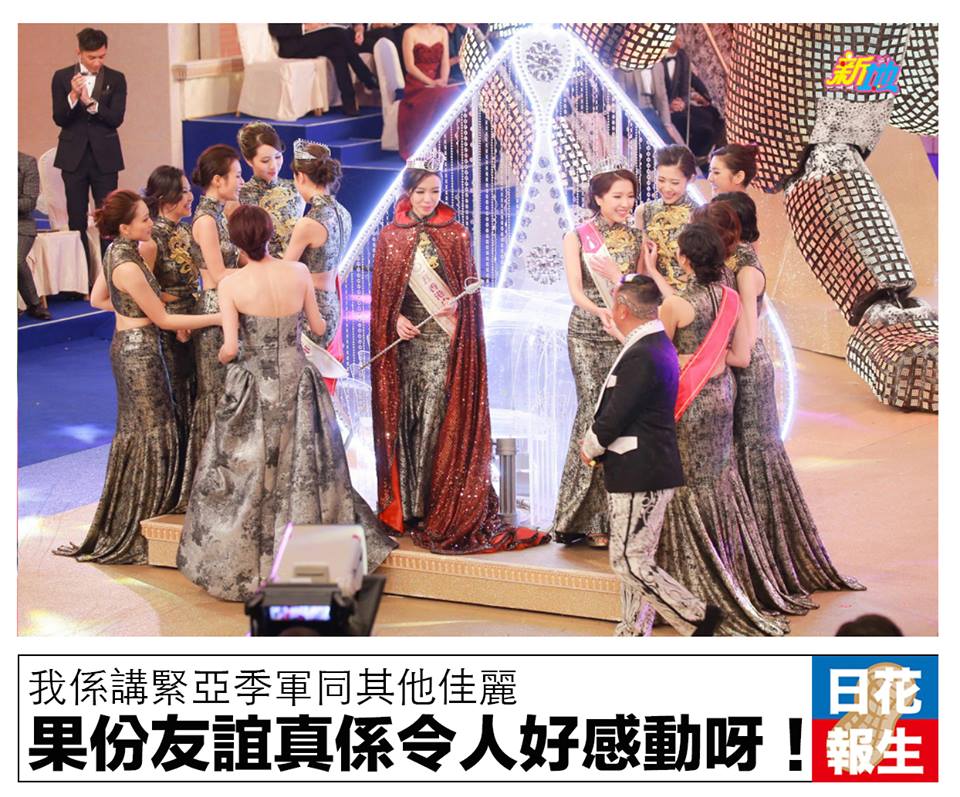
Of course, she seems to understand that if
she were ever to be in a policy-making position, she is bound to upset
certain people and will need good acting skills to feign to care about
everybody.
- She said: "I appreciated the movement
because it really made us think. Some people were very for it and some
people were very against it, but I think it's that clash that will inspire
us to think. It was beneficial to Hong Kong because we finally saw people
with passion for society. On a social level, I think it really allowed
different sections of society to communicate, despite hostility sometimes."
But Mak said she was disappointed in seeing that people were not able to
tolerate different views during the movement and she described it as "the
worst thing you can have in a democratic society."
There are plenty of other opportunities to
do the same, such as discussions about the meaning of July 1st or October
1st in Hong Kong. There was no need to Occupy Admiralty for 79 days for
nothing. Can she really name any benefit that came out of it?
- It is the opinion of many Hongkongers is that the Umbrella Revolution has
vindicated the Chinese Communists in their clearance of the Chinese students
in the June 4th 1989 incident.
- Louisa Mak posted a photo of herself at
Occupy Admiralty. Has she gone in to surrender herself to the police for
attending an unlawful gathering? According to Professor Benny Tai, this
final step is necessary in order to complete the rule-of-law process for
civil disobedience. Lousia Mak is a law student, and should be well-aware of
this.
- About the Umbrella Revolution: She said
she went to the protests because it was a "special moment of Hong Kong's
history". She said both the movement's supporters and detractors should have
gone to the scene to "see for yourself, to feel it". She did not say whether
she was a supporter or a detractor. "I think action speaks for itself."
At one level, this is a lot of words about
nothing. It is vacuity (=lack of thought or intelligence; empty-headedness).
At another level, this is smart because by saying nothing of substance, she
can't offend anyone. If she stands up for one of the sides, she will be
marked as the enemy by the opposite side. So it is smart to say a lot of
sweet nothings. At yet another level, this type of cynical obscurantism
means that the speaker has no moral principles and therefore must never ever
be trusted on anything. At her age, she is already well-versed in reciting
the script in the manner of the Clintons.
- As such, Louisa Mak is the second coming of CY Leung.
- Well, Louisa Mak has some wishful
thinking about being able to stay above the fray. She has signed with TVB
and that means she can't give interviews to Apple Daily/Next Magazine as a
matter of company policy. However,
Apple Daily has taken her South China Morning Post interviews and
reported them as news. Their particular way of positioning things means that
Louisa Mak is regarded as the Yellow Ribbon Miss Hong Kong by some people
already. The title of their piece is: "10 A's Miss Hong Kong responds on
Occupy Central photo, the Umbrella Movement was beneficial." And she can't
afford to either admit or deny for fear of offending one side or the other.
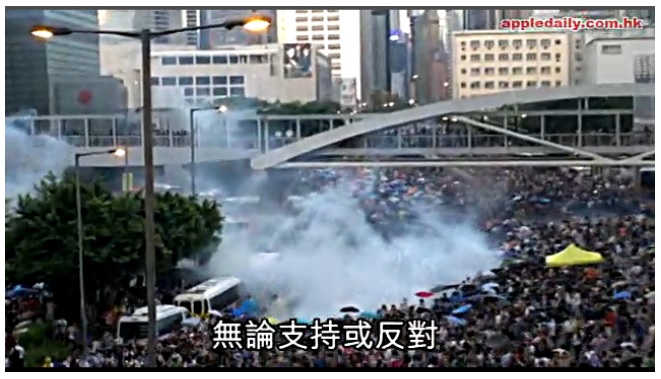
Whether you support or oppose the movement's
supporters and detractors ...
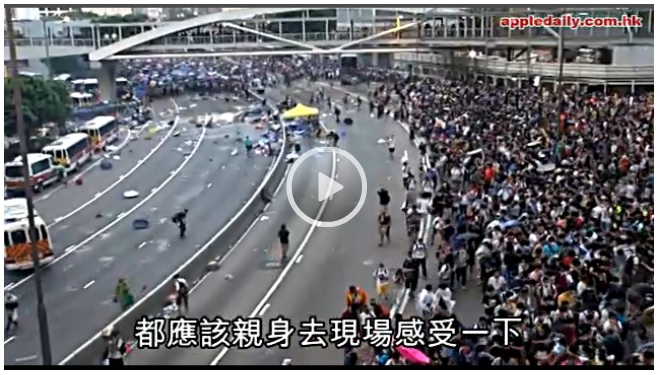
... you should have gone to the scene to see
for yourself, to feel it
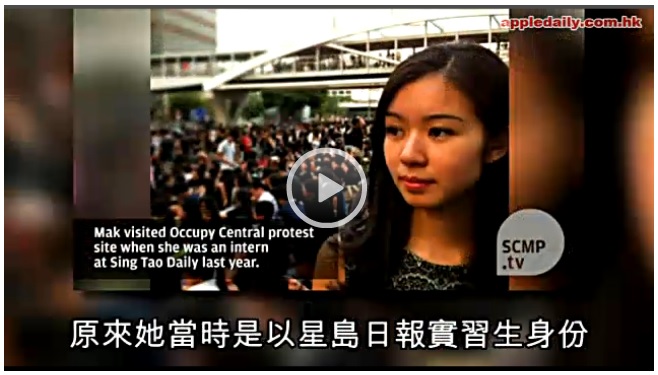
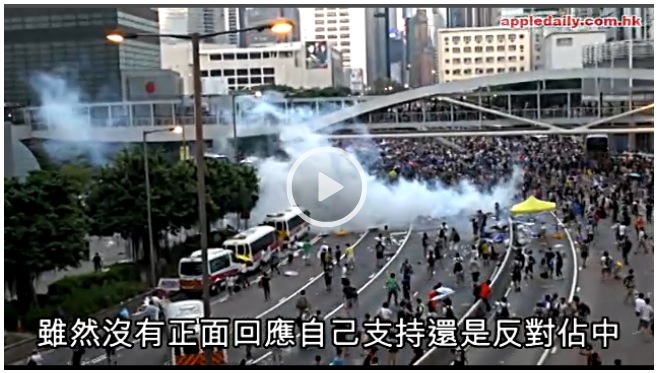
even though she has not directly answered
whether she supports or opposes Occupy Central
- If Louisa Mak decides to come out of the
closet as a Yellow Ribbon, she may become the first Miss Hong Kong ever
without a Home Visit Permit for traveling to mainland China.
After the glorious days in which
Hong Kong established itself as the tourist-bashing capital of the world:
there was a long lull. But now
the summer vacation is over and we set out for another round of
tourist-bashing.
(Wen
Wei Po) August 31, 2015.
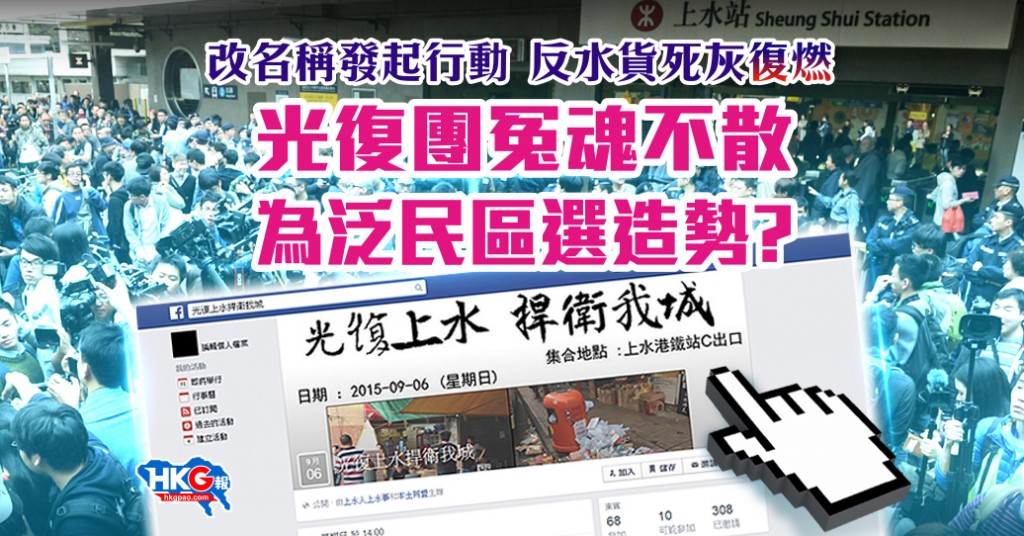
According to Facebook posts, the Localism
Alliance and Sheung Shui Affairs For Sheung Shui People are jointly
organizing the Reclaim Sheung Shui event. Both groups were formed very
recently. They declare that on September 6th at 2pm, they will assemble at
the Sheung Shui MTR station. The stated goal is to protest against
parallel traders. There are two march routes, including the Sheung Shui
Metropolis Plaza, Lung Sum Road, Shek Wu Hui district Sun Fung Road/Sun Wan
Road and the Shek Wu Hui taxi stand. These locations are the main
distribution points and transportation hubs in Sheung Shui.
According to our investigation, not many
people are active in Localists Alliance and Sheung Shui Affairs For Sheung
Shui People. Previously the anti-parallel trading action were initiated by
the North District Parallel Traders Concern Group led by Ronald Leung Kim-shing.
So far, 65 persons have indicated that they will join the upcoming action,
including Ronald Leung Kim-shing. In early 2014, Leung Kim-shing organized
an anti-locust movement to curse out mainland tourists on Canton Road in
Tsim Sha Tsui. The incident was roundly condemned by Hongkongers and Leung
was forced to apologize afterwards and that movement stopped.
According to our information, the Sheung Shui
Affairs For Sheung Shui People members come from the Hong Kong City-State
faction. Most of them are local Sheung Shui residents. Other Hong Kong
City-State people have formed similar organizations such as Hung Hom Affairs
For Hung Hom, People etc.
In April this year, the central
government announced that the multiple-visit permits for Shenzhen residents
will be turned into once-a-week permits. Afterwards, the localist radicals
became clearly more restrained. According to information, they want to
re-start the Reclaim campaigns because the District Council elections are
coming up.
Our newspaper
contacted Sheung Shui rural affairs committee chairman Hou Chi-keung. He
said that he is opposed to anyone who wants to attack his community,
especially businesses. "We should welcome anyone who comes to Hong Kong to
spend money as long as they are not doing any illegal." He said that these
protestors are not interested in opposing parallel traders, but they only
want to get more votes. "If this goes on, not just Sheung Shui but all of
Hong Kong will be victimized."
(Wen
Wei Po) September 5, 2015.
According to information, the
organizers applied for a no-objection notice from the police. They proposed
two march routes. The police met with the organizers on Wednesday. The planned
route begins from the Sheung Shui train station and goes past the Metropolis
Plaza, Lung Sum Road and a number of streets in Shek Wu Hui before ending back
at the train station. Along most of the way are various pharmacies, cosmetic
stores, jewelry stores, etc. The police may be shutting down certain vehicular
lanes to allow them to march instead of on the narrow sidewalks. However, the
organizers did not promise.
Our reporter made field observations at Lung
Shum Road and Shek Wu Hui on Thursday afternoon. Although this is a
three-day holiday in mainland China, there were not a lot of mainland
customers. One pharmacy owner says: "Business volume is half of what it was
compared to the beginning of the year. We can be said to be sustained by
saline solution. We don't know how long we will last." When told that people
are coming to "reclaim Sheung Shui" this Sunday, the pharmacy owner moaned:
"I am more dead than alive already. I'm surely going to die this time."
A Ms. Wang from Shenzhen said: "Previously, I
came two to three times a week to shop here. Now I come once a week or every
ten days. I usually come with three or four other persons. We are not
parallel traders. We want to buy some daily necessities while in Hong Kong.
We don't want to be regarded as parallel traders."
(Oriental
Daily) September 6, 2015.
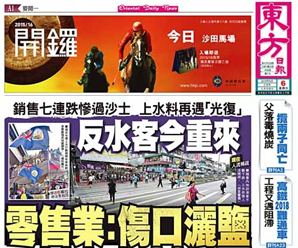
Front page cover:
Anti-parallel trade demonstration returns
Retail industry: Rub salt in wound
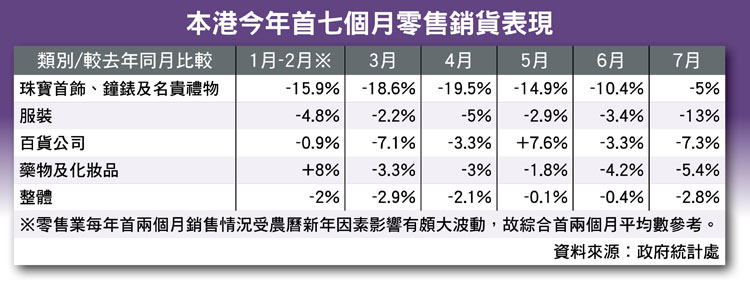
Monthly year-to-year comparisons of retail
trade sectors.
Columns: Jan-Feb (combined to smooth out Lunar New Year impact); March; April;
May; June; July
Rows: (1) Jewelry, accessories, watches and luxury gifts; (2) Clothing; (3)
Emporiums; (4) Medicine and cosmetics; (5) Overall
Example: Clothing was down 13% in July 2015 compared to July 2014.
Hong Kong's retail industry has gone through
seven consecutive months of declines. Even as the retail industry is
shrinking, the Localism Alliance and Sheung Shui Affairs For Sheung Shui
People groups are organizing Restore Sheung Shui to demonstrate against
dispensaries and shops in Sheung Shui.
(Oriental
Daily) September 6, 2015 16:12.
About 30 Localism Alliance
members and about 30 Loyalty Militia members were separated by metal
barricades outside the Sheung Shui MTR station. The Loyalty Militia said that
they were forming a new group to represent authentic localism. The two sides
hurled insults at each other. The Localism Alliance called their opponents
"dog thugs" and accused them of forming an unlawful gathering to betray the
people of Hong Kong.
The
procession grew to about 100 persons. As they turned from Lung Sum Road into
Sun Kong Street, they stood outside dispensaries and dried goods stores and
cursed them out for betraying the nation of Hong Kong. They chanted loudly:
"Please give our homes back our peace and tranquility." Many dispensaries
shuttered their gates when the procession approached. A number of
pedestrians exchanged foul-mouthed curses with the demonstrators. When the
procession neared Sun Sing Road, they surrounded a police car and accused
the police of mistreating a police dog by locking it inside the car.
The Localism Alliance began their march at
around 3pm, with regular demonstrator "Captain
America" waving the British Colonial Dragon/Lion flag for Hong Kong
independence. The Loyalty Militia planned to follow them to publicize the
violence wrought by the localists' anti-parallel trade activities. But since
they didn't get a letter of mon-objection from the police, they were not allowed
to proceed. They split up on their own after an hour or so.
(Oriental
Daily) September 6, 2015 16:20
A number of stores decided to
shutter their gates just in case of trouble. One fruit store owner said that
"I have to feed my wife and kids" and he was going to lose several thousand
dollars in sales because of these demonstrators.
Some dispensaries moved their goods indoors
and lowered their gates. Fortunately this was a false alarm as the
demonstrators moved away peacefully. Other dispensary workers ignored the
police warning and continued to do business.
Jewelry store worker Mr. Liu said that they
will be half-opened/half-closed. He said that before March, 70% of his
business came from mainlanders and now his total volume has dropped to 50%
of what it was before the demonstrations began in March.
(Oriental
Daily) September 6, 2015 16:36.
When the procession got back to
the Sheung Shui MTR station, the organizers said that the march was over.
However, more than 100 persons stayed behind to quarrel with the Loyalty
Militia who called the demonstrators "scoundrels" and "trash."
(Oriental
Daily) September 6, 2015 17:17.
Hong Kong Indigenous
spokesperson Ray Wong was reported to have been arrested. This angered the
localists who then blocked the pedestrian overpass and two entrances into the
Sheung Shui MTR station.
(Wen
Wei Po) September 7, 2015
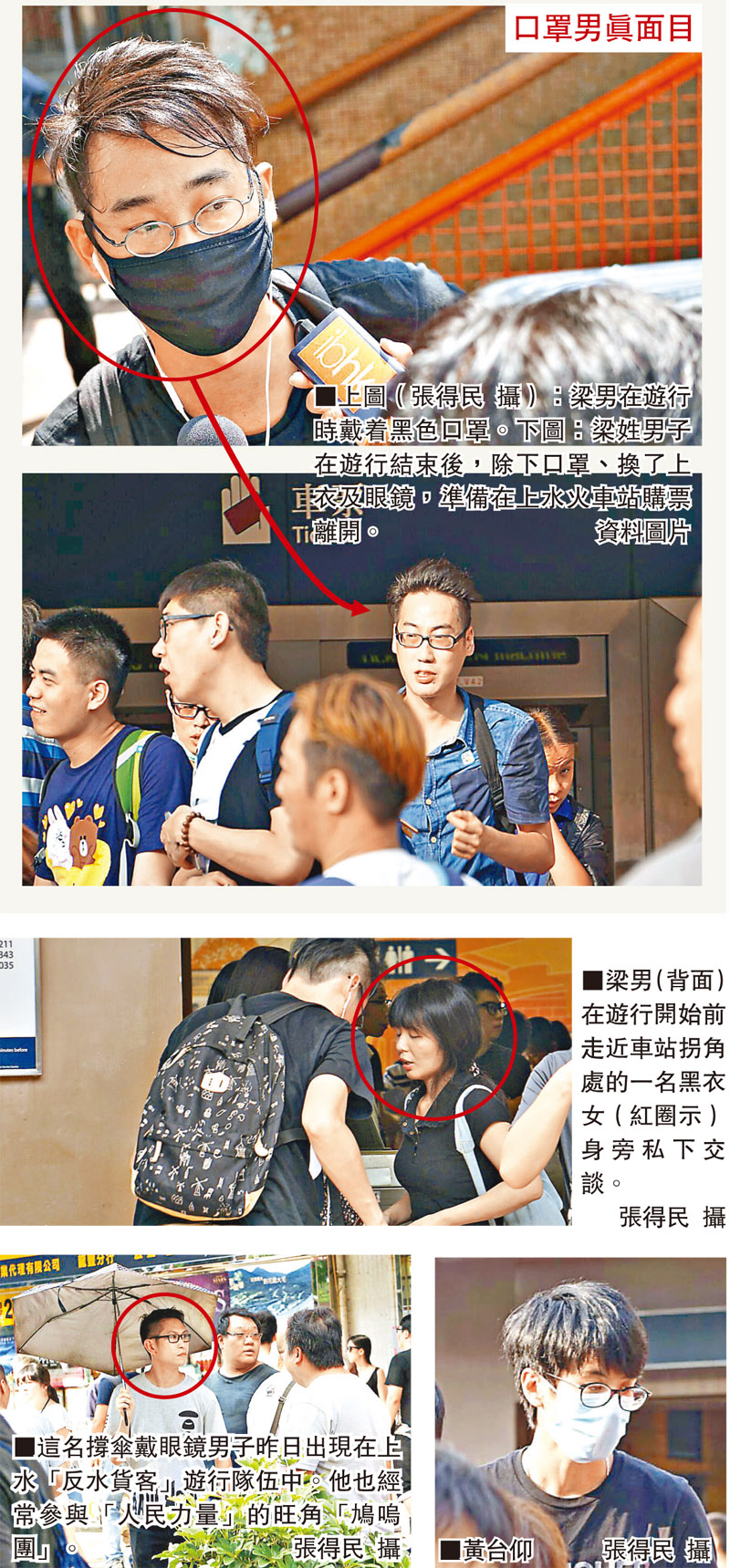
The Reclaim Sheung Shui action was instigated
by two Facebook pages, the Localism Alliance and Sheung Shui Affairs For
Sheung Shui People. However, the organizers declined to disclose their
relationships with other organizations. At around 2pm or so, two young men
wearing black t-shits and black masks claimed that they were the organizers.
Before the march began, one of the men went up to a woman in a black t-shirt
at the corner of the train station. The two held a conversation which the
woman seemed to be issuing instructions while the young man kept nodding.
The woman then left quickly and did not participate in the march.
When the march began, there were Hong Kong
Indigenous members led by Ray Wong, the People Power members who were the
core of the Mong Kok Shopping Revolutionaries, City-State members led by
Cheng Hup and Sammy Wan, and the North District Parallel Trade Concern Group led
by Leung Kam-shing. However, apart from Captain America hoisting the British
Dragon-Lion flag for Hong Kong independence, none of the other people
carried flags that identified their organizations.
The young man in black said that his family
name was Leung and would not uncover his face. After the march ended, our
reporter followed Leung to the Sheung Shui MTR station, and saw him change
his black t-shirt into a blue denim shirt and from round-rim glasses to
thick rectangular glasses. He also purchased a single-trip ticket and did not use an
Octopus card, because this stops the police from tracking his movement by the Octopus
card.
In reviewing the
records, our reporter found that Mr. Leung bear a strong resemblance to a
Leung Chi-han who was arrested during Occupy Central. In early October 18,
Leung Chi-hang was arrested for tossing a metal barricade onto Nathan Road
in Mong Kok and charged with disorderly conduct in public. On May 12, Leung
Chi-hang was found guilty. On July 22, Leung Chi-hang won an appeal on the
basis of a newly found video tape and was set free. According to
information, Mr. Leung has close ties with Hong Kong Indigenous, which
showed up in force to support him.
City-State member Sammy Wan is a follower of
Grandmaster Chin Wan. In the City-State hierarchy, he is known as the Big
Golden-winged Roc General. He is also closely linked to Leung Kam-shing and
both have appeared on Wan Chin's City-State Forum. In March 3, this Hong
Kong Police's Cyber Security and Technology Crime Bureau arrested a man
named Wan for teaching demonstrators how to break through the police line,
including information on how to manufacture petrol bombs and percussion
grenades.
(EJinsight)
September 7, 2015.
Some ôlocalistö groups staged a protest
Sunday against the so-called parallel-goods traders from the mainland,
resuming a controversial campaign after a break of about six months. The
protest took place at Sheung Shui, with demonstrators chanting slogans such
as ôTackle parallel trading, return my peaceful homelandö and ôProtect
livelihoods, reclaim Hong Kongö, Apple Daily reported.
Police
detained at least one activist as the protest forced some shops in the area
to pull down their shutters.
Leung
Chi-han, a member of the Local League and the organizer of the protest, said
parallel-trading activities have revived in Sheung Shui in the run-up to the
mid-Autumn festival. Many drugstores sell moon cakes manufactured and branded
by local hotels, attracting a lot of parallel traders.
Fresh activities by parallel traders have
affected the lives of local people, protesters say.
According to the police, about 150 people
took part in the demonstration Sunday. As the protesters marched near San
Kung Street and Hong Chai Street, where most drugstores are located, police
set up a cordon to prevent the demonstrators from getting too near. Some
shops downed shutters for the whole day while some re-opened after the
protesters passed.
A Sheung Shui resident surnamed Fok, who
didnÆt join the protest himself, said parallel-trading activities have been
getting more serious recently. The traders throw rubbish such as cardboards
and lunchboxes everywhere, and some would even urinate in the streets, Fok
was quoted as saying.
There were some conflicts, verbal as well
as physical, between the protestors and supporters of the pro-establishment
camp.
Ray Wong Toi-yeung, a spokesperson for the
group Hong Kong Indigenous, alleged that a person from a pro-establishment
group had laid his hand on a volunteersÆ neck. He wondered if the police
would arrest that person. Wong himself was involved in a skirmish with the
police, an incident which led to Wong and a police officer falling to the
ground. Wong was later arrested on charge of assaulting the officer.
Videos:
TVB News
https://www.youtube.com/watch?v=q0unyeKLkpo This is your fair-and-balanced
report giving time to the demonstrators, the counter-demonstrators and the
government.
TVB News
http://news.tvb.com/local/55ec4eaf6db28ca464000004 Demonstrators obstruct
police car outside Sheung Shui police station
Epoch Times
https://www.youtube.com/watch?v=xrZw6DZ-ND0
HKG Pao
https://www.youtube.com/watch?v=ZQdqbUyZi7U Counter-demonstrators calling
the demonstrators "Trash".
HKG Pao
https://www.youtube.com/watch?t=13&v=gku--aKc6mU Arrest of Ray Wong
HKG Pao
https://www.youtube.com/watch?v=1QHjTUwpZ_0 Demonstrators obstructing
police vehicle from entering police station.
INT News Channel
https://www.youtube.com/watch?v=OH7NPwCDDKY 14:50 Start of the
demonstration march, including the counter-demonstrators.
INT News Channel
https://www.youtube.com/watch?v=xNwZoc8JLEo 16:27 Follow-up action after
the demonstration ended.
INT News Channel
https://www.youtube.com/watch?v=1ezR_-bIHqw 16:52 Inside the Sheung Shui
MTR station
SocREC
https://www.youtube.com/watch?v=HLOIlhnvuT0 Mr. Leung addresses the
press
SocREC
https://www.youtube.com/watch?v=HIHT_JNH9QE Counter-demonstrators give
speeches
SocREC
https://www.youtube.com/watch?v=VrQgT_b_qTY 1:03:00 full-length record
SocREC
https://www.youtube.com/watch?v=IrOnrZ2eX8U A female shop owner is
unhappy with the demonstrators
SocREC
https://www.youtube.com/watch?v=QorQ3vfWbIM Demonstrators go past a
dispensary, with someone shouting about wanting peace and tranquility with a
megaphone.
SocREC
https://www.youtube.com/watch?t=441&v=7HjciT8ds-s Marching through the
streets
SpeakoutHK
https://www.youtube.com/watch?v=TpHICQCnW3g
Internet comments:
- The iconic photo of masked
valiant warriors harassing a little girl in the name of Justice:
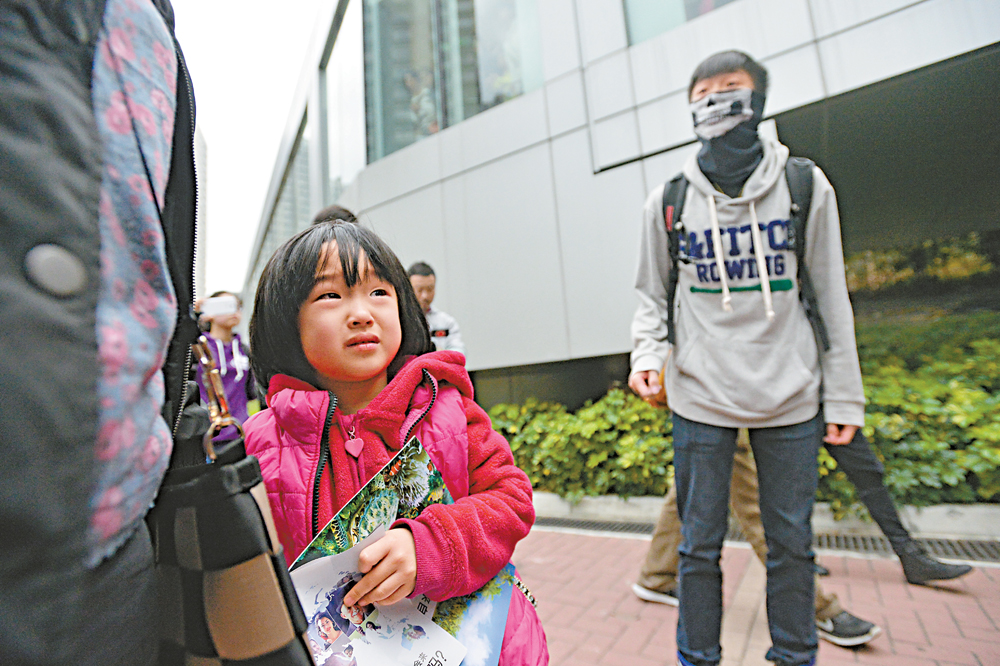
- Different group, different people, but same
modus operandi. Here is the very fearful Mr. Leung (no full name, please) of
the Localism Alliance speaking to the press. It's very hot today, Mr. Leung
is sweating but he doesn't want to remove the mask.
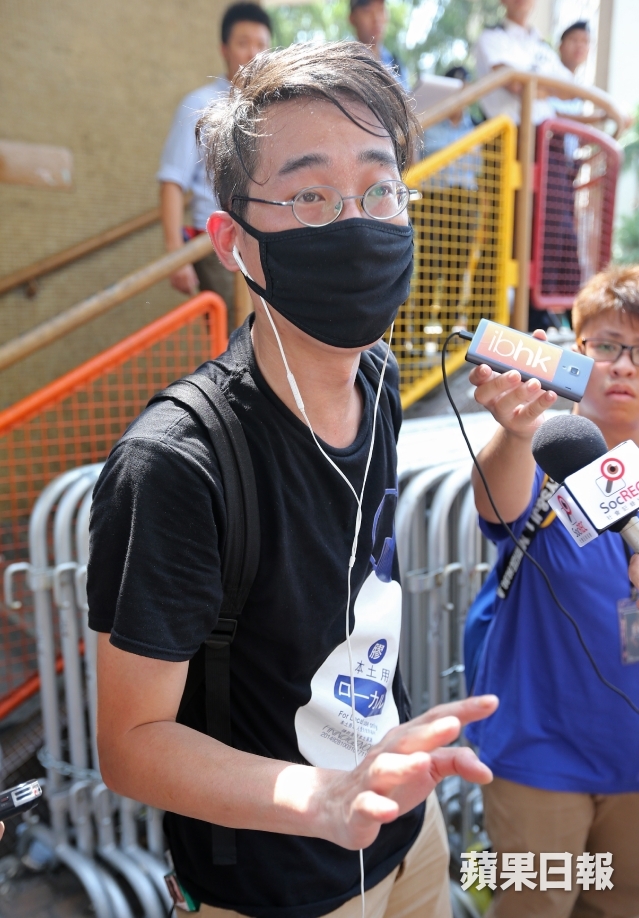
There is even another guy who wore a black mask as
well as a black wool cap! It was more than 30 degrees centigrade out there
today!
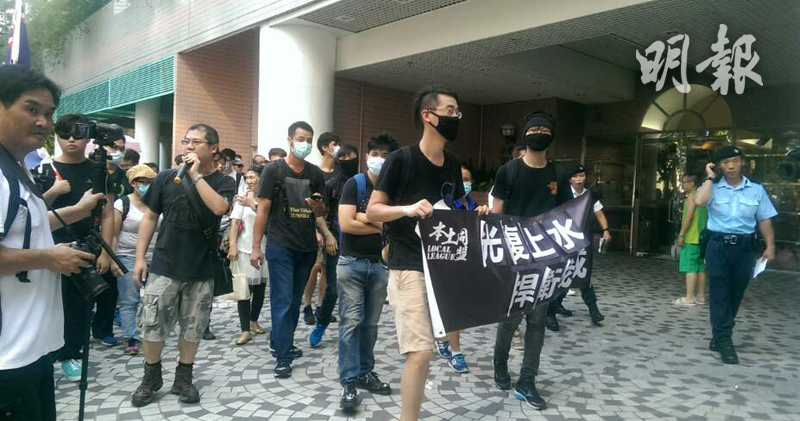
P.S. Ming Pao reports that people yelled at
them: "All of you are wearing masks to hide your faces because you are
breaking the law!" and "Take off those masks!"
- Living off mainland tourists is addictive.
We should wean off it.
- Great. What do you propose as substitute?
Develop our manufacturing industry, so that we go back to making plastic
flowers and Christmas trees?
Develop our agricultural industry, so that we go back to grow rice in Yuen
Long and raise cattle in Tai Wai?
Develop our fishery industry, so that we go back to living on sampans in
Aberdeen/Causeway Bay and catching fish?
You can have your crazy ideas, but you are not going to force us to come
with you.
- Any such protests won't put a
dent to the parallel trade industry. So why do it? Simple. The protestors want
attention. They are not the only ones as more groups have set up to steal the
limelight.
- I want attention too. I am going to set up a City-State Localism People Power
League of Alliance Concern Group.
- The demonstrators show up one Sunday afternoon in one location every three
months with pre-event publicity (3pm-5pm Sunday at Sheung Shui Plaza). All the parallel traders have to do is to
avoid that time period and that location. They will carry on as usual at all other times.
- The name of the action is
Reclaim Sheung Shui. This means to take back Sheung Shui, not just for two
hours every three months
but it should be forever. All those who attend this event to walk and talk are just jerking off.
It has nothing to do with the meaning of Reclaim. Frankly, I really want to
ask them: Why bother, if you can't accomplish what you say that you want to do?
- (Oriental
Daily) September 6, 2015 13:09.
The Facebook group "Defend
Localism" has initiated a Reclaim Sha Tin action today. They will gather at
2pm in New Town Plaza, Sha Tin. So far 30 Internet users have indicated that
they will attend.
The
counter-demonstration group Loyalty Militia will set up a booth at the
entrance to the Metropolis Plaza this afternoon. This means that the booth
will be along march route of the the Localists Alliance and Sheung Shui
Affairs For Sheung Shui People. The Loyalty Militia said that certain
people are harassing mainlanders (parallel traders, tourists and
immigrants) in the name of Localism. They say that such people only want
to vent anger, but their actions cannot accomplish anything except to
establish Hong Kong as the international tourist-bashing capital of the
world. They said that these so-called Localists do not represent the
people of Hong Kong.
- The premises behind Reclaim Sheung Shui are
self-contradictory.
(1) The flag hoisted by the
demonstrators is the British Dragon-Lion flag for Hong Kong independence. If
you want an independent Hong Kong, then it should be freed from both the
former British colonial masters and the Chinese Communists. But their idea of
an independent Hong Kong is under the flag of the Brits.
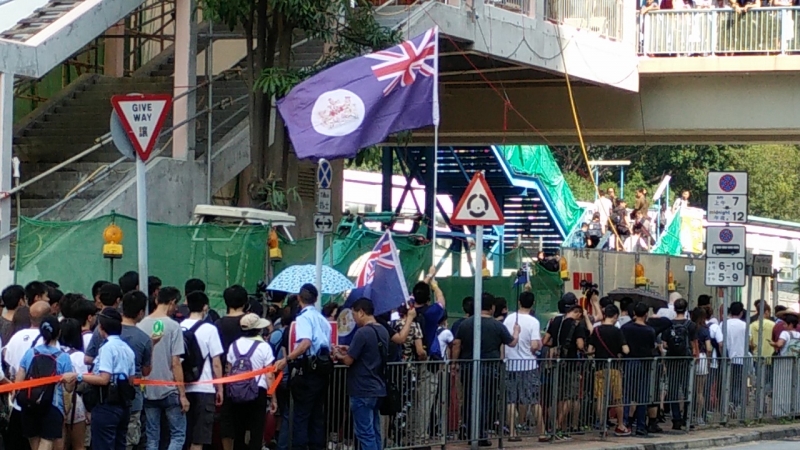
(2) Mr. Leung (no first name, please) said
that parallel trade business is even better now than before the
demonstrations earlier this year, and that is why they have to come out
again. If the retail/restaurant/hospitality/tourism industries are all
looking at consecutive months of year-to-year decline but the parallel
trade business is booming, then that means that the earlier demonstrations
did not reach the intended target and hurt innocent others instead. How about some
reflection on the implications? Why repeat an action that has proven to be
a failure? Why keep on hurting innocent others?
(3) The
demonstrators marched through the streets of Sheung Shui. They used
megaphones to scream "Give us our peace and tranquility!" There was more
noise pollution coming from the demonstrators than the parallel traders
ever did.
(4) The
demonstrators gathered to leave and created congestion at the Sheung Shui
MTR station, especially since they want to harass the
counter-demonstrators. There was more congestion and chaos coming from the
demonstrators than the parallel traders ever created.
(5) (Commercial
Radio) The demonstrators said that they objected to the
dispensaries putting their merchandise on the street. For them, this is
encroaching on public space. Well, they're the same ones who defended the
inalienable right of unlicensed peddlers to set up the
Kweilin Night Market
on public space. Even more so, they are the same ones who occupied public
space in Admiralty, Causeway Bay, Mong Kok and Tsim Sha Tsui for days on
end.
(6) The
demonstrators said that they objected to dispensaries selling shampoo.
They said that dispensaries should only sell medicine and nothing else in
order to serve the people. It's wonderful that the freest market in the
world should have a bunch of masked men making decisions on what goods can
be sold or not in specific types of stores. Where have they been anyway,
because dispensaries all over Hong Kong have been selling shampoo for
decades already?
P.S. I have always wondered why they sell condoms in 7/11
convenience stores. (The answer is simple: 7/11 is responding to market
forces.)
(7) The demonstrators said that stores should serve their local community
members, and that is why there shouldn't be so many dispensaries and
jewelry stores in Sheung Shui. Does that mean that they are not allowed to
buy or use anything outside their own communities? For example, if
your mother drops dead, you better not hold services at the funeral
parlors in Hung Hom because they are only allowed to serve Hung Hom
residents. You have to bury her in Sheung Shui. Since there is no cemetery
or funeral parlor in Sheung Shui, you just going to have to dig a hole
somewhere and toss her remains into it. By the way, you are reminded that
this is against the
law.
- This particular demonstrator
named Tse Kim-lung was arrested by the police. He was released shortly
afterwards.
https://www.youtube.com/watch?v=Cyl6AAIoo5w
http://hk.apple.nextmedia.com/realtime/news/20150906/54173258
https://www.youtube.com/watch?v=Cyl6AAIoo5w Guess for what? Freedom?
Democracy? Justice? Human Rights? Universal Suffrage? Universal Values? No, he was smoking a cigarette in
a restricted area and refused to comply with a police order to put out that
cigarette. He is a Freedom Fighter and he should be exempt from the normal
laws because we live in chaotic times and we have certain very special
responsibilities.
- Hong Kong Indigenous member Ray Wong was
arrested by the police.
https://www.youtube.com/watch?v=dYdEjHFhaok
http://cablenews.i-cable.com/webapps/news_video/index.php?news_id=465751
https://www.facebook.com/HongKongHermit/videos/1051197121558213/
https://www.youtube.com/watch?v=ADJphI2ZsrM His group encountered a
group of counter-demonstrators, the police separated the two groups, there
was shouting, Wong insisted that the police must arrest the other party
(namely, the Blue Ribbon guy nicknamed "Magnifying Glass") for assault, Wong
screamed: "I ask you. I ask you. Are you going to arrest him?", Wong got
pushed back up the stairs by policemen even as he kept screaming, the
policeman wanted to see Wong's ID, Wong said: "I'll show you, but are you
going to arrest him?", the two men hit a parked bicycle and fell down on the
ground, Wong was arrested without resistance, both Wong and the policeman
underwent medical examinations at the hospital later. Wong will likely be
charged with assaulting a police officer.
- i-Cable
http://cablenews.i-cable.com/webapps/news_video/index.php?news_id=465764
After being released, Ray Wong told the press: "There were two police
officers in the police van. One of the policeman put a grip around my head.
Both my hands were cuffed at the time. The other policeman kept using his
elbow to hit my chest. More than ten to twenty times. He also kept slapping
me in the face, hitting my head, pulling my hair. This episode lasted for
about 10 minutes." Well, I looked at the video and I didn't see any redness
on his face. How can you not have any sign on the face after 10 minutes of
slapping?
-
Confrontation between the two groups
https://www.youtube.com/watch?v=HufD4sCcZRM inside the Sheung Shui MTR
station.
- Comparison
of newspaper coverages:
Oriental Daily: Considered
mainstream pro-establishment, pro-China, largest circulation newspaper
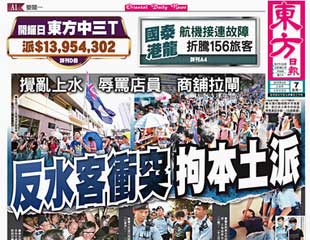
Anti-parallel trade clashes
Localists arrested
Wen Wei
Po: Considered pro-China, pro-establishment
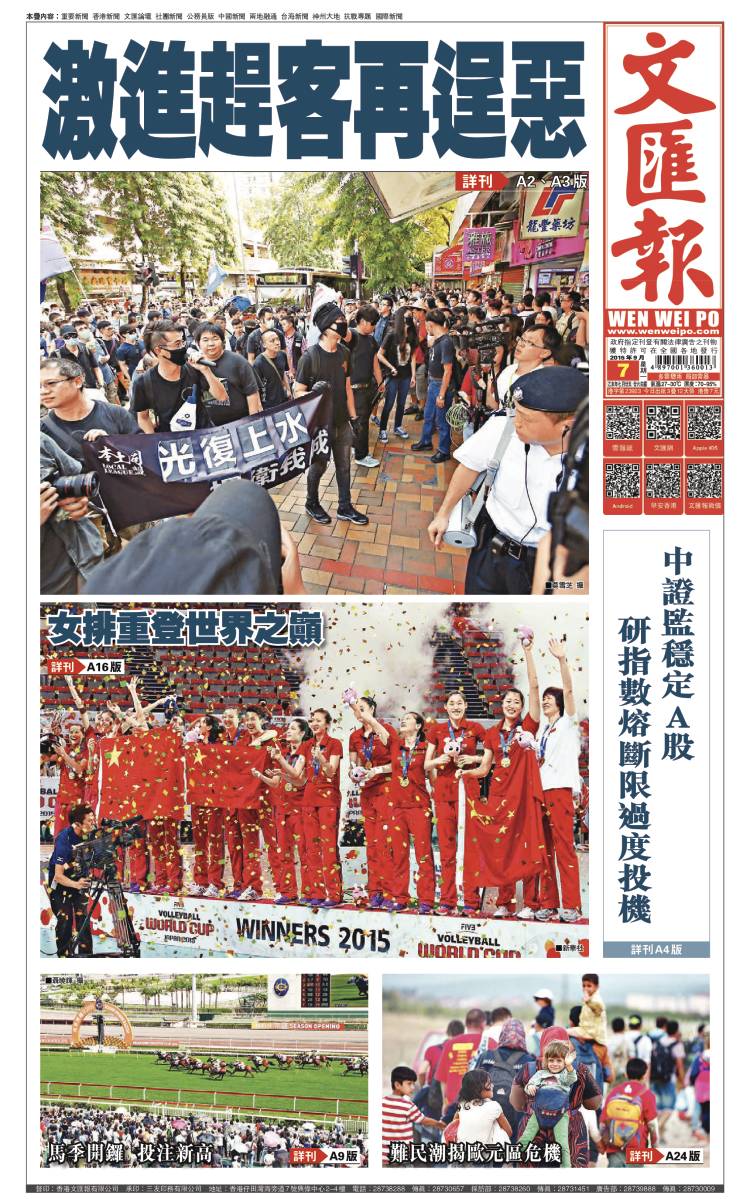
Apple Daily/Ming Pao: Considered
pro-democracy, anti-China
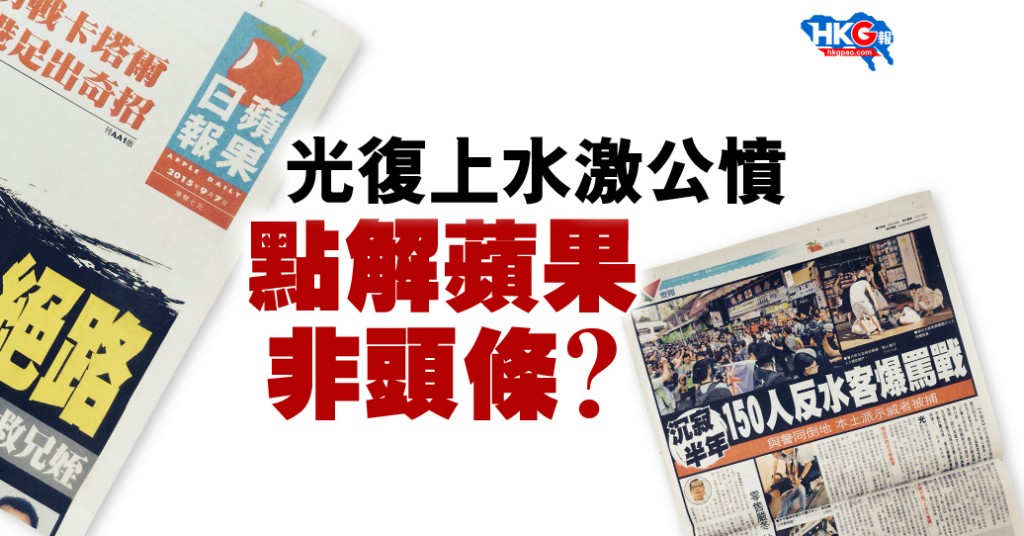
Buried somewhere in the back pages.
(HKG
Pao)
Throughout yesterday, the Reclaim Sheung Shui incident
featuring the men in black masks were continuously featured on television
and Facebook. So this story was naturally on the front pages of most of
the mainstream newspapers. The two exceptions were Apple Daily and Ming
Pao, which normally like to pump up social conflicts but chose instead to
be low-keyed in this case.
Everything is about the getting the votes
for your side. Such is democracy. Previously political parties entered the
fight over the appointment of the Pro Vice Chancellor at Hong Kong
University because there are 170,000 HKU alumni most of whom are voters.
The students tried to help by "using force to stop tyranny" but the public
reaction was adverse and only 6% of the alumnus turned out for the HKU
Convocation's Extraordinary General Meeting. The Civic Party calculated that they had more to lose than
gain, so they have retreated silently and left the mess to legislator Ip
Kin-yuen, who faces less pressure as the Education sector candidate backed
by the Professional Teachers Union and therefore not accountable to the
total population.
As the main promulgator of Umbrella
Revolution, Apple Daily knows full well that the citizens disapprove of
violence as in Occupy Central and Shopping Revolution. With the District
Council elections coming up, the pan-democrats obviously wish that the
citizens could forget about the 79 days of occupation. So they have
quickly switched their stances to become warm, fuzzy, friendly and
moderate.
So when
those radicals came and started another round of violence-filled clashes
shown around the clock on television and Facebook, the Yellow Ribbon
newspapers
naturally downplayed the incident and hoped that their readers won't
notice.
(EJinsight)
HKU convocation wants CY Leung out as
chancellor September 2, 2015.
A University of Hong Kong (HKU) convocation
voted overwhelmingly Wednesday to have Chief Executive Leung Chun-ying step
down as chancellor. About 82 percent of 9,298 people who attended the
extraordinary general meeting in person or voted by proxy backed a
non-binding motion to change the HKU charter that makes the Hong Kong chief
executive nominal head of tertiary institutions by default.
Also, 84 percent wanted the university
council to confirm the appointment of Johannes Chan as pro vice chancellor
before the month is out. Chan is the only candidate recommended by a search
committee.
Meanwhile, a motion to support a July 31
statement by a group of senior academics regarding the appointment process
was crushed. The statement, jointly issued by 10 deans of the university
faculty, defended the appointment process, saying itÆs protected by the
Basic Law, Hong KongÆs mini constitution. The deans also criticized the
storming of a July 30 meeting of the HKU council by some students.
Council chairman Leong Che-hung said he
respects the voting results. He said the council will follow the HKU
statutes to ensure academic freedom and autonomy.
Chan said the results clearly reflected the
views of HKU alumni. He said he hopes the council will consider the alumniÆs
opinions and follow the usual practice in appointing key university
officials.
(SCMP)
Emotions run high as HKU alumni speak out against political interference in
school's council. September 2, 2015.
University of Hong Kong alumni made
emotional speeches lambasting political interference in their alma mater's
governing council as more than 3,000 gathered on Tuesday to debate the
controversially delayed appointment of a pro-vice-chancellor.
Dubbed the "biggest reunion of HKU alumni",
it was an extraordinary general meeting of the HKU Convocation, a statutory
body comprising 162,000 graduates and lecturers.
Results of the votes on six non-binding
motions, relating both to the appointment and the role of Chief Executive
Leung Chun-ying as ultimate head of the university, will be announced on
Wednesday morning. More than 9,000 votes were cast, either in person or by
proxy.
"It is a historic occasion," said Tai
Keen-man, a member of the Convocation's standing committee, before the
meeting at the Convention and Exhibition Centre. Some 3,200 attended it.
Alumni old and young turned up, including
high-profile figures such as former chief secretary Anson Chan Fang On-sang,
Democratic Party veteran Martin Lee Chu-ming, radio host Stephen Chan
Chi-wan and former pro-establishment lawmaker Choy So-yuk.
Most of those selected by lot to speak
expressed anger and disappointment at the deferred appointment as
pro-vice-chancellor of Professor Johannes Chan Man-mun, a former law dean
lambasted by Beijing-loyalist media over his ties to an Occupy Central
co-founder.
The chief executive's role at HKU should
merely be to "hand out diplomas" said law graduate Sean Leonard. "Minus 30
points to the council, whose members acted as drama queens," he added, in
apparent reference to an incident in July when council member Lo Chung-mau
collapsed on the floor as students stormed a meeting.
Another member said the council should
"show love and care for students instead of calling them 'red guards'."
Council member Professor Arthur Li Kwok-cheung had used the term to describe
students who stormed the July meeting.
Writer Dominic Tsim Tak-lung said
universities should be universal: "There should be no discrimination in
terms of sex, age à or political beliefs".
The few who argued HKU was not subject to
political interference , including Beijing loyalist Chang Ka-mun, were
greeted with catcalls.
The motions included calls for Chan to be
appointed, for the chief executive to be removed as chancellor and for
structural reform. Another supported a statement by 10 HKU faculty deans,
which called for institutional autonomy but condemned the storming of the
meeting.
The Education Bureau later issued a
statement. ôWe appeal to the community not to impose pressure on the
council, and not to hinder the normal functioning of the university and the
council,ö it said.
The bureau also said the chief executive -
as chancellor - did not interfere with academic freedom and institutional
autonomy, nor did he participate in the selection of staff. The bureau went
on to defend the existing system, saying it was effective and appealed to
different stakeholders to respect and comply with the law.
- (HKGPao)
Observations inside/outside Part 1. By Lam Wan-seng. September 2, 2015.
1. Almost all the important
figures of the Civic Party were present. Many Democratic Party luminaries from
various generations were present too. This was like an annual party for
political parties. Most luminous were Anson Chan and her sister.
2. The speeches became a Civic Party show as
Audrey Eu, Alan Leong, Margaret Ng, Kenneth Kwok and others spoke. This
went on for three hours. Overall, this event became a pro-Johannes Chan forum.
3. Interestingly, while the Democratic Party
was present in large numbers, only the retired Martin Lee and Yeung Sum
spoke. Did they reach a backroom deal for the Civic Party to assume
ascendancy? Or did the Democratic Party deliberately take the back seat in a
fight for a HKU Pro Vice Chancellor? Interestingly, the Democratic Party never
responded to HKG Pao's question on whether they supported the students'
siege on the HKU University Council members.
4. While the political parties assumed such
prominence during the proceedings, Ip Kin-yuen who initiated the motions
insisted that that no political parties were involved. This was quite
ironic.
5. This Hong
Kong University Convocation Extraordinary General Meeting took place in the Hong Kong Special Administrative Region of the People's Republic of China, but all speakers
were required to speak in English. It was particularly humorous to hear the
speaker say in English that they want to eliminate the "anachronistic
tradition left behind by the British colonial administration in Hong Kong"
of having the Chief Executive serve as HKU Chancellor. What if the speaker
used Cantonese to say exactly the same thing? Would the speaker be accused
of Communization of Hong Kong?
6. Everybody knows that the "anachronistic
tradition left behind by the British colonial administration" had never been
a problem either during the entire colonial period or the terms of the first
two Chief Executives after the handover. If there is a problem now, then it
is a problem with the current Chief Executive. They said that if Wen Wei
Po/Ta Kung Pao said that Johannes Chan is unqualified for not possessing a
doctorate degree, then neither does CY Leung. But how many of the former
Chief Executives/Governors hold doctorates? They were HKU Chancellors
because they held the top post in Hong Kong. That was all.
7. There were some voices against Johannes
Chan. The difference was that when the speaker was supportive, the audience sat quietly and
respectfully. When the speaker was not supportive, they booed. So what is
this about defending the right of others to speak their opinions with your
life?
(HKGPao)
Observations inside/outside Part 2. By Lam Wan-seng. September 2, 2015.
Out of 9,298 valid votes, 7,821 votes
agreed with "confirming Pro Vice Chancellor within 30 days," 7,657 votes
agreed with "the Chief Executive shall not be the Chancellor" and 7,633
votes agreed with "the University Council chairman must be acceptable to the
students and the teachers." Meanwhile Lawrence Pang Wang-kee's proposal to
"support that statement from the ten deans" was vetoed.
Can those 7,000+ votes represent all of the
170,000 or so HKU alumni? Can the publicly subsidized HKU hide inside their campus
and ignore the opinion of the general public? At this time, the pro-Johannes
Chan faction has mobilized and won the HKU Convocation EGM vote. All those
alumni who did not show up and all those others who have no voting rights
shall now be "represented" in public opinion.
Here I have to say that the Yellow Ribbons
have a good propaganda apparatus. On the way over from the Wan Chai MTR to
the Hong Kong Convention Centre, I received three pro-Johannes Chan
pamphlets. These informed me about how many articles Wen Wei Po/Ta Kung Pao
have published against Johannes Chan, etc. They didn't tell me about
Johannes Chan's embroilment in the donation scandal or how many articles
Apple Daily has published on behalf of Johannes Chan.
Along the way, I also came across a number
of other organizations setting up booths or collecting signatures against
Johannes Chan's qualifications. An Internet poll showed that almost 70% of
Hongkongers don't think Johannes Chan should be the Pro Vice Chancellor. So
does the one-sided support inside the Convention Centre represent genuine
public opinion?
In history, the most active and vigorous
voices comes from the radicals. The majority opinion often gets overwhelmed.
Such was the case with the issue of the HKU Pro Vice Chancellor. Such was
the case with Occupy Central at first. To the silent majority who doesn't
want to be "represented" by these people, can you afford to stay silent?
(Wen
Wei Po) September 3, 2015.
On the issue about setting up a committee
to follow up on the incident, Lawrence Wan said: "How can we follow up on
something that hasn't taken place yet? I think that we should wait to see
what happens, and then see how to follow up."
However, Ip Kin-yuen couldn't care less. He
pronounced victory after fewer than 5% of the alumni voted in favor of the
resolutions. He equated the results to the preferences of the entire alumnus
body. He insisted that the University Council must heed the opinions of the
alumni.
When asked about whether the 5% of voters
could represent all the alumni, Ip Kin-yuen changed the subject. He said
that many people gave up their personal time to attend this meeting. He said
that one individual even "signed a notice for his daughter even as he
attended the meeting." But when the reporter pressed him on giving a direct
answer, he said that he wants to "leave it up to everybody to decide for
themselves."
Internet comments:
- Why were the results of the
HKU Convocation non-binding? Well, that's because it is not up to the HKSAR
Chief Executive, or the University Council, or the HKU Convocation, or the
alumni body as a whole, or the Student Union officers, or the student body as a whole, or
the HKU Academic Staff Association, or the staff body as a whole, or the people of Hong Kong
(whatever that means) to decide. If there
is going to be a change, it will have to go through the Hong Kong Legislative
Council. Here is what the law says:
With respect to the position of the HKU
Chancellor during the British colonial era,
Cap 1053 University of Hong Kong Ordinance s 12 Officers and teachers, their
appointments, powers, duties and emoluments (30 June 1997):
(2) The Chancellor shall be the
chief officer of the University
(3) The Governor shall be the Chancellor ...
This was replaced after the
handover from the United Kingdom to the People's Republic of China on July 1,
1997 by
CAP 1053 University of Hong Kong Ordinance s 12 Officers and teachers, their
appointment, powers, duties and emoluments:
(2) The Chancellor shall be the
chief officer of the University
(3) The Chief Executive shall be the Chancellor ...
Therefore, the Hong Kong
University Convocation can vote from here to eternity and it wouldn't change a
thing. They need to have a vote in the Hong Kong Legislative Council to change
the
Cap 1053 University of Hong Kong Ordinance. Meanwhile everything else
is just a lot of hot air from politico-types. Let them waste their time if
they want to. Don't let them waste yours.
-
Hong Kong Free Press says: "The Chief Executive serves as the
chancellor for all of Hong KongÆs tertiary institutionsùa custom that begun
with the territoryÆs colonial-era governors. Traditionally only a symbolic
role, opposition to this system has increased along with perceived
interference in university governance by Chief Executive Leung."
No, it is not
a custom (Merriam-Webster:
(a)
a usage or practice common to many or to a
particular place or class or habitual with an individual. (b) long-established
practice considered as unwritten law. (c) repeated practice. (d) the whole
body of usages, practices, or conventions that regulate social life.).
It is the
written law.
- If it is your custom to wipe your bum with
your left hand holding the toilet tissue, you can easily change to using your
right hand. Not so easy if it is the written law!
- (HKG
Pao) September 2, 2015.
At the Hong Kong University
Convocation Extraordinary General Meeting, there were 9,298 valid votes. Of these the proposal of Lawrence
Pang Wang-kee received 1,814 votes for. This means that 7,484 persons
disagreed with the proposal.
What does Pang's proposal say? Pang's proposal
is a statement of support for the joint statement from the ten HKU Faculty
Deans. It says: "We will not tolerate any uncivilized action that disrupts
the normal operations of the University ... we are deeply disturbed by the
actions harassing the HKU University Council." Basically, the idea is that
they wanted to defend academic freedom and autonomy. This is consistent
with what the other proposals are saying. So how can this be vetoed by
7,484 out of 9,298 persons? Do these people support what Billy Fung and
his fellow students as well as unknown outsiders did on that night? Has
the era of the Yellow Guards arrive at the Hong Kong University?
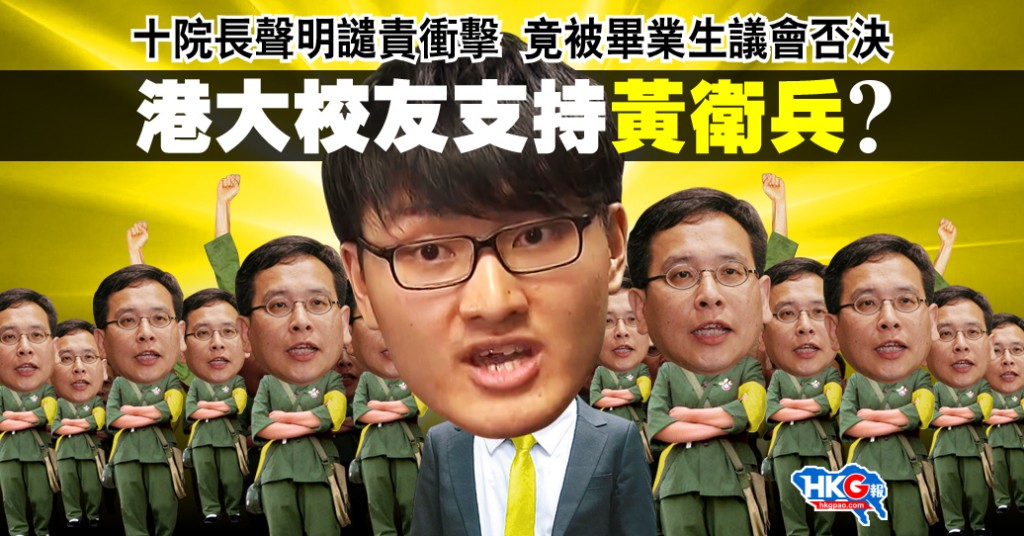
- Look at these numbers:
(Wen
Wei Po) September 3, 2015
When asked whether the
Convocation voting is representative of the alumni body, John Wan Chung-on did
not respond directly. He is said that this was a data point of reference. The
Hong Kong University Convocation has 162,000 or so members. Of these, 9,298
cast valid votes, either in person or by verified proxy.
9,298 out of 162,000 is 5.7%.
Of those who voted, the four
motions on "The University Council must confirm the appointment of the Pro
Vice Chancellor within 30 days," "Amend the Hong Kong University Ordinance so
that the Chief Executive won't be the Chancellor", "The Chief Executive can
only hold ceremonial responsibilities in university matters," and "The
Hong Kong University Council will set up a special group to follow
and implement the resolution" received between 7,745 to 7,821 votes (4.8% or
so).
Do you think that these 5.7%
feel/think the same way as the absent 94.3%? No way. Because of:
Response bias:
A typical RDD phone survey being
conducted today has a cooperation rate of less than 20%. 10% is considered a
good response rate from an online panel. When we report results of these
studies, we are assuming that the vast majority of people who didnÆt respond
would have responded in the same way as those who did. Often, this is a
reasonable assumption. But, sometimes it is not.
We know for sure that those who
didn't show up are different from those who did, because the latter cared
about the issues (even though the entire effort was futile as everyone who is
a university graduate must surely know about the Hong Kong University
Ordinance) to attend in person or sign a proxy statement.
Because the distribution of opinions among
those who didn't show up is unknown, it would be wrong for an
academically-minded individual to say one way or the other. Ip Kin-yuen
only wants political exploitation, so he is quite willing to state that THE
HONG KONG UNIVERSITY ALUMNUS BODY HAS VOTED THIS OR THAT BY AN OVERWHELMING
MAJORITY.
In like
manner, do you remember the Hong Kong University Public Opinion Programme's
"REFERENDUM"?
They got 792,808 valid votes overwhelmingly in support of "Civil Nomination"
of Chief Executive. Even if they are truly valid (ignoring all the documented
ways of casting unlimited votes in their system), we have to remind ourselves
that the population of Hong Kong is 7.3 million of which 3.5 million are
registered voters. Do you think that the non-voters feel/think the same way?
- Spiral of Silence:
(Wikipedia)
The spiral of silence is a political
science and mass communication theory proposed by the German political
scientist Elisabeth Noelle-Neumann.
Spiral of silence theory stipulates that
individuals have a fear of isolation, which results from the idea that a
social group or the society in general might isolate, neglect, or exclude
members due to the members' opinions. This fear of isolation consequently
leads to remaining silent instead of voicing opinions. Media is an
important factor that relates to both the dominant idea and people's
perception of the dominant idea.
...
The following steps summarize how the
process works:
- We can distinguish between fields
where the opinions and attitudes involved are static, and fields where
those opinions and attitudes are subject to changes... Where opinions
are relatively definite and static û for example, ôcustomsö û one has to
express or act according to this opinion in public or run the risk of
becoming isolated. In contrast, where opinions are in flux, or disputed,
the individual will try to find out which opinion he can express without
becoming isolated.
- Individuals who, when observing their
environments, notice that their own personal opinion is spreading and is
taken over by others, will voice this opinion self-confidently in
public. On the other hand, individuals who notice that their own
opinions are losing ground will be inclined to adopt a more reserved
attitude when expressing their opinions in public.
- It follows from this that, as the
representatives of the first opinion talk quite a lot while the
representatives of the second opinion remain silent, there is a definite
influence on the environment: an opinion that is being reinforced in
this way appears stronger than it really is, while an opinion suppressed
as described will seem to be weaker than it is in reality.
- The result is a spiral process which
prompts other individuals to perceive the changes in opinion and follow
suit, until one opinion has become established as the prevailing
attitude while the other opinion will be pushed back and rejected by
everybody with the exception of the hard core that nevertheless sticks
to that opinion.
This process of formation, change and
reinforcement of public opinion. The tendency of the one to speak up and
the other to be silent starts off a spiraling process which increasingly
establishes one opinion as the dominant one. Over time, these changing
perceptions establish one opinion as predominant one and they change from
the liquid state to a solid norm.
Nazi Propaganda: The Nazi Party used the Spiral of Silence in
their favor as they constantly bombarded the public with the images and
ideas which they were trying to popularize. They were giving the masses an
impression that everyone was in compliance with their ideals and if one
was not, punishment was sure to ensue. ... A large number of Germans were
more indifferent than supportive to the Nazi idea of Aryan race
superiority. They were not all-in or all-out which led to a more passive
stance on the discrimination. The Nazi government realized the impact of
peer pressure, especially in youths, and used it to gain support.
If you feel differently but you are too
afraid to speak up, then you will be voiceless on all that happens afterwards.
You will shoulder the blame.
- (Ta
Kung Pao) ET Net/Sky Post held an online poll. Of the 1,128
respondents, 75% said that they don't agree with the motion to ask the
university council to confirm the appointment of the Pro Vice Chancellor
within 30 days. 71% said that they don't agree with not having the Chief
Executive as the university chancellor.
(Oriental
Daily) September 3, 2015
Recently, the court decided that
17 defendants accused of contempt of court during Occupy Mong Kok will be
released because the Department of Justice was unable to follow the procedures
to issue the summons on time. This was absolutely incredible. Occupy Central
was the single most significant event in recent Hong Kong history, and it is
also basic procedure to file documents on a timely basis. It is incredible
that the Department of Justice could commit such a basic error. Nobody can
believe this, unless someone deliberately let defendants off.
It has been rumored that the Department of
Justice was infested with Yellow Ribbons. During the Occupy Central period,
many Department of Justice openly wore yellow ribbons to work. They ignored
the standard protocol that public servants should be politically neutral.
While the higher-ups were aware of this problem, they couldn't do anything
because not even Secretary of Justice Rimsky Yuen could do anything. During
Occupy Central, the police made numerous arrests. It is rumored that many of
those cases went into oblivion, because the Department of Justice declined
to prosecute.
Is this
true or not? That is hard to prove. But this most recent incident makes it
hard to believe that the Department of Justice people did not deliberately
stall or mishandle the cases. These are the hard facts.
The pro-China people have always said that the
British colonial administration deliberately left a lot of government
workers to enable them to continue their influence in Hong Kong. Thus, many
government departments worked to obstruct the central government in
conjunction with the pan-democrats and foreign forces. The corruption
charges against former Chief Executive Donald Tsang is an example. Such
rumors have acquired greater support with the recent dismissal of
contempt-of-court charges against the 17 Occupy Mong Kok individuals.

(Oriental
Daily) August 31, 2015.
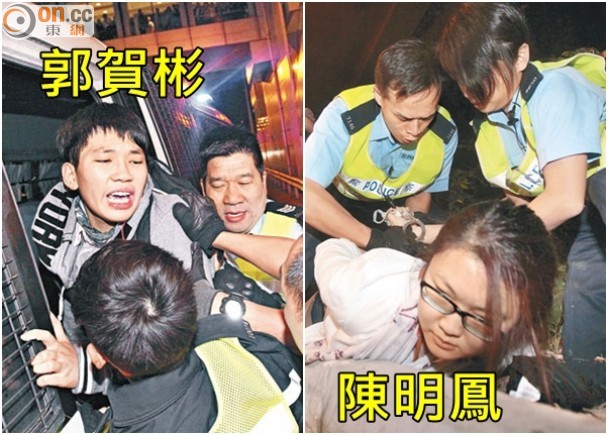
16-year-old Form 3 student Kwok Ho-bun and
21-year-old university student Chan Ming-fung were accused of assaulting a
police officer and obstructing police business on March 8, 2015 in Tuen Mun.
The magistrate said that the testimonies of
the prosecution witnesses were inconsistent with the videos that were
presented. For example, the police testified that he saw Kwok throwing a
water bottle from 7 meters away and therefore went up to arrest him. At the
time, no one was between them. However, the video showed that there were
quite a few people between them, which means that the witness did not enough
room to spot Kwok throwing the bottle. In the video, Chan Ming-fung could
not be seen to be pulling to free Kwok either.
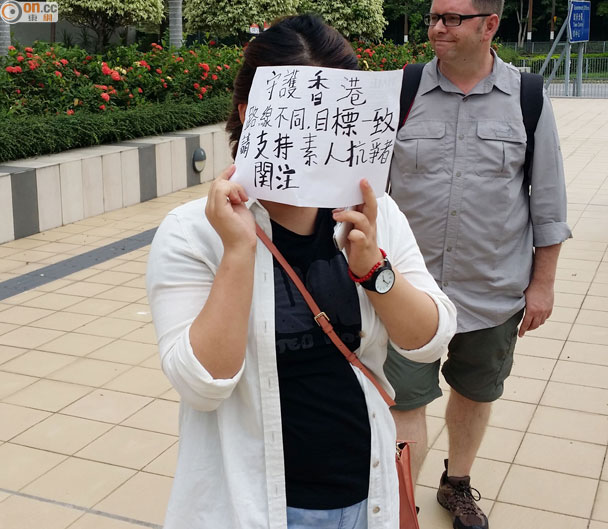

(HKG
Pao) September 1, 2015. (Oriental
Daily) September 15, 2015. (Wen
Wei Po) September 16, 2015.
On November 20, 2014,
31-year-old waiter Tung Fat-yin allegedly got to know the 12-year-old boy victim in
the Occupy Mongkok area. At the time, the boy was afraid of being punished by
his parents for not doing his homework. Therefore he was roaming around the
Occupy Mongkok area and got to know the defendant. It began raining, and the
two entered an empty tent where the defendant placed his hand on the shoulders
of the boy to talk. The boy had no money so he followed the
defendant to the apartment of a friend in Yau Ma Ti district. As the two got
to Sai Yeung Choi Street South, the defendant suddenly groped the private
parts of the boy. Later that night in the Yau Ma Ti apartment, the boy got up
at 4am
to use the restroom when the defendant suddenly reached out to grab the
genitals again. The defendant told the boy not to tell anyone. The boy was too
tired and sleepy to leave. The missing
boy's parents checked the Facebook of their son and suspected that he was with
the defendant who was a most recent addition as Friend. They learned that the defendant worked with a gay organization
on Nathan Road. So they went looking around that area and saw the two coming
out of a building.
They called the police to arrest the defendant.
On June 27, 2015, the defendant allegedly
sexually molested a 14-year-old boy, whom he had gotten acquainted with over
Facebook. At the time, the boy was staying in Caritas Hospital. The defendant visited the boy as the friend of the boy's guardian.
During the visit, the defendant suddenly put his hand underneath the blanket
and touched the private parts of the
boy. The boy was scared and did not say anything immediately because he knew
that the defendant is a Taekwondo expert. Several days later the boy told
the doctor.
The defendant
pleaded guilty on three counts of sexual assault in Kowloon City court. The
defense claimed that the defendant did what he did out of "curiosity." The
magistrate set sentencing on September 15 pending reports on the background
and psychological conditions of the defendant. Meanwhile the defendant will
continued to be held in detention.
The defendants' parents promised that they would
take their son to see a psychiatrist. The father said that he felt ashamed
that he did not bring up his son right. But the magistrate said that the
defendant first became friendly with the boys before suddenly touching their
genitals. As such, the action was premeditated and dishonest. Therefore the
magistrate sentenced the defendant to 9 months in prison.

(Hong
Kong Free Press) September 4, 2015.
A man has been found guilty of assaulting a
police officer during the pro-democracy Occupy movement last year based on
the testimony of the attacked police officer, which was deemed
ôtrustworthy.ö The verdict on Ho Man-chung, 36, came despite the two video
clips submitted as evidence failed to show him carrying out the attack. Ho
appeared in court on Friday on the charge of assaulting a police officer. He
was charged after he ignored police warning and refused to leave Tamar Park,
then was said to have pushed away a police officer last October.
Magistrate Chu Chung-keung, handing down a
guilty verdict, said that although the two video clips submitted to the
court as evidence failed to show the defendant pushing and swearing at the
police officer as was alleged, the attacked police officer appeared
ôtrustworthyö and did not hesitate under cross-examination.
Counsel for the defence argued for a
lighter sentence, saying that Ho is currently unemployed and that the said
police officer was not physically injured. The magistrate, however, said
that assaulting a police officer was a serious offence. Ho was released on
bail and the case was adjourned to September 21 for sentencing, after the
magistrate reviewed reports on the defendant.
(Oriental
Daily) September 4, 2015. (Oriental
Daily) August 19, 2015. (HKG
Pao) September 5, 2015.
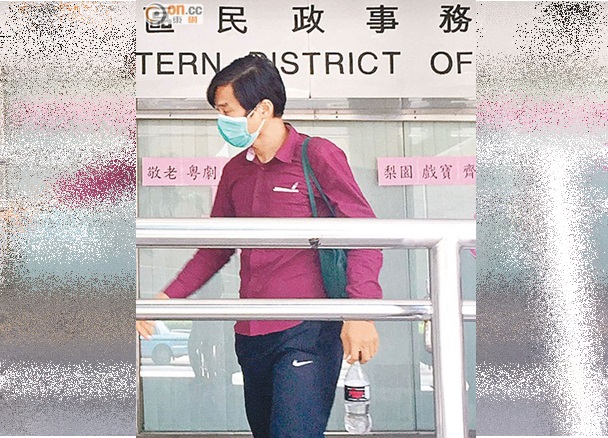
36-year-old unemployed man Ho Mun-chung was
accused of attacking police sergeant Yip Chun-bong in the early morning of
October 15, 2014 in Admiralty.
36-year-old unemployed man Ho Mun-chung was
accused of ignoring police warnings to leave the Lung Wo Road/Tamar Park
area during a clearance. Furthermore, Hon was alleged to have pushed
sergeant Yip Chun-bong in the chest, leading to a charge of assaulting a
police officer.
The
prosecution presented testimony that the defendant unbuttoned all his shirt
buttons, bared his chest and challenged the police sergeant: "Shoot me!" The
police sergeant testified that the defendant then pushed him in the chest.
So the police sergeant yelled "Assaulting a police officer" and arrested the
defendant with the help of his colleagues. Two other arresting police
testified but they said that they did not see the defendant push Yip.
The defendant chose not to testify himself.
The defense said that there was no evidence that the defendant participated
in the Occupy Central movement. The location of the incident was far away
from the Occupy Central area. Therefore the possibility cannot be excluded
that the defendant was passing by the scene on his way home (at 2am on the
October 15) and then Yip sprung out to tackle him. Furthermore Yip was not
carrying out any clearance duties because there were only about a dozen
individuals in total at the scene and none of them were disturbing the
public order.
The
magistrate said that the sergeant's testimony was clear and direct with no
evasion. Therefore, he is a reliable witness. The defense presented two
videos. In those videos, the defendant's hands were blocked from view. So
the magistrate decided the videos neither proves nor disproves the
culpability of the defendant. Therefore the overall evidence led to a guilty
verdict.
The magistrate said that even
though the defense presented two videos, it could not be determined whether
the location was Tamar Park, or whether it was the time of the incident, or
whether the defendant shoved the police sergeant. The magistrate chose to
believe the sergeant and found the defendant guilty.
The defense pleaded in mitigation that the
36-year-old man was a graduate in mechanical engineering but is presently
unemployed and living alone. The videos showed that the assault was not
severe, the police sergeant was not injured and therefore the case was
trivial. Since the defendant is now aware that assault is a serious action,
he should be sentenced to either a fine or community service. Sentencing
will be held on September 21 pending probation reports.
(Oriental
Daily) September 21, 2015.
The defendant Ho Man-chung stated that while
he has degrees from Hong Kong University and the University of Science and
Technology, he wanted to lead his own lifestyle and therefore does not have
a fixed job. At present, he is living in the offices of Citizens' Radio, but
that doesn't mean that he could not perform community service. He emphasized
that he is no homeless bum. He expressed regret at his crime and promises
that he will be a law-biding citizen in future. The magistrate sentenced him
to 120 hours of community service.

(Oriental
Daily) September 22, 2015.
Last year, National People's
Congress deputy secretary-general Li Fei came to the Asian Expo to explain the
August 31st resolution. About 20 Civic Passion members demonstrated outside.
Two of them were arrested: 26-year-old Ma Kai-chung and 22-year-old Chow Mun.
Ma was charged with unlawful assembly, while Chow was charged with unlawful
assembly and resisting arrest. The prosecution summoned the security manager
Wong Tak-chun as witness. Wong testified that the two defendants traversed the
table/barrier that they had set up for security checks and headed towards the
metal barricades manned by the police. The closed circuit television had
recorded the entire scene.
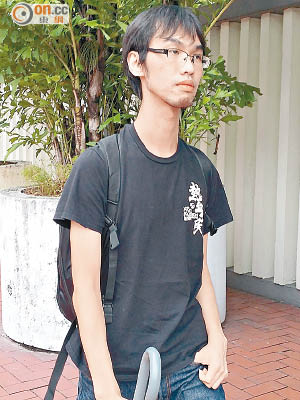
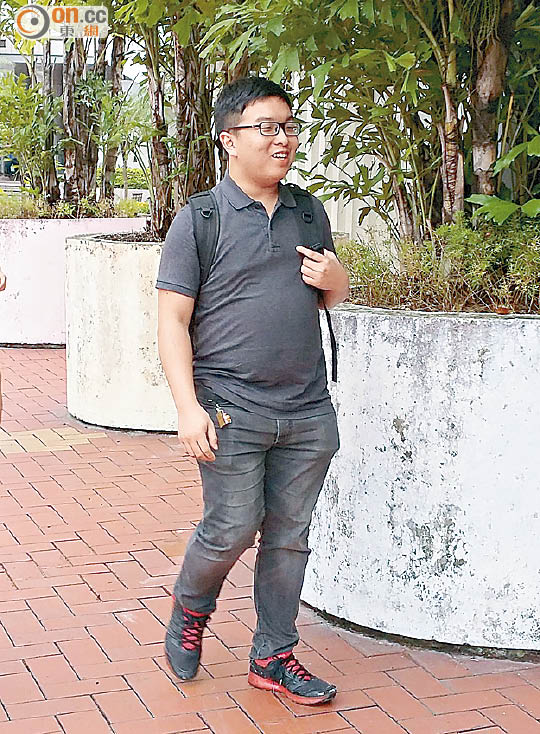
Ma Kai-chung and Chow Mun
(Wen
Wei Po) September 22, 2015.
On September 1, 2014, about 20
Civic Passion members demonstrated outside the Asia Expo. Ma was the first to
cross the security line while yelling "Down with the Communists!" Chow
followed right behind to the police line, waving a flag and rattling the iron
barricade. The two defendants pleaded not guilty at first. During the trial,
the magistrate said that it was clear from the video that the two defendants
were disturbing the peace and he failed to understand what the defense could
be arguing about. On September 22 in court, the two defendants changed their
plea to guilty.
The first
defendant pleaded through his lawyer that this was a first-time offense in
which nobody got turn, and he acted only out of his concern for Hong Kong
and his political demands for "civil constitution, civil nomination."
Therefore he hopes for a lenient sentence. The magistrate pointed out that
while the people of Hong Kong have the right of assembly, it must be in
accordance with the law and it must not disturb social peace and order.
Sentencing will take place on October 14.
The second defendant continued to plead not
guilty to the charge of resisting arrest. Undercover police officer Chow To
testified that Chow Mun resisted repeatedly at Shui On Centre (Wan Chai). It
took three police officers to subdue him. The trial will resume on September
23.
Video:
https://www.youtube.com/watch?v=dbPuiEK1fMM

(SCMP)
January 11, 2017.
An activist who was fined for obstructing police officers
during the 2014 Occupy movement in Hong Kong lost her bid on Wednesday to
challenge her conviction after a High Court judge found that her conduct at
the time had ôundoubtedlyö made the execution of police duties more
difficult.
Julie Li Sin-chi, who was slapped with a HK$2,500 fine in
August 2015 following the conviction, said on Wednesday that she would
consider pursuing her case at a higher court.
On October 15, 2014, Li was sitting alone on a pavement near
the junction of Lung Wo Road and Tim Wa Avenue enclosed by metres of metal
fencing. She was later lifted and taken away by policewomen from the site,
and did not struggle during the process.
In an appeal against her conviction for obstructing police,
Li, an office executive, dismissed her arrest more than two years ago as a
violation of her right to peaceful assembly. She appealed on the grounds
that a lower court had erred in its finding that the two policewomen who
took her away from the pavement were carrying out their mission properly. Li
also argued that the lower court had erred in finding her to have been
intending to obstruct police officers on a mission.
In a ruling on Wednesday, Mrs Justice Judianna Barnes Wai-ling
rejected LiÆs argument that the officers had not been authorised to clear
the pavement near the main protest site.
ôGiven the circumstances, police were required to clear the
sites, including the road and the pavement, lest people gather on the
pavement and make trouble,ö the judge stated. ôThe measures put in place by
police were reasonable,ö she added.
The judge also found it ôimpossibleö that Li could not hear
the police warnings broadcast over loudspeakers. ôIt was reasonable that
police believed [Li] was taking part in an unlawful assembly and removed
her,ö Barnes said. The judge thus found the police action necessary and
proportionate, even though Li was exercising her right to peaceful assembly
at the time.
She ruled that the conviction was safe and dismissed LiÆs
appeal. Before the ruling, Li and her supporters, including lawmaker ôLong
Hairö Leung Kwok-hung, blamed the government for violating HongkongersÆ
right to peaceful assembly in this case.

(SCMP)
Hong Kong's pan-democratic parties face dilemmas in November poll. April 7,
2015.
To politicise or not to politicise? That's
the dilemma facing pan-democratic parties as Hongkongers go to the polls in
November for the first time since last year's Occupy protests.
Some in the camp are keen to build on the
passion generated by the 79 day sit-ins by focusing on big questions of
democracy and Beijing's influence in the city. Many see parallels to 2003,
when pan-democrats secured an overwhelming victory in the district council
polls just months after 500,000 people took to the streets to fight a
national security law. But others - mindful of the fact that many voters
resented the youth-led protests and the disruption they brought - feel it
would be better to run on a track record of hard work in the community
rather than on grand questions of universal suffrage.
The former strategy is reflected in the
mushrooming number of new groups of young people looking to take the
momentum of the umbrella movement forward by chasing some of the 431 seats
on 18 councils that are up for grabs on November 22. But incumbent district
councillors - and even one of the founders of the Occupy Central movement -
are not convinced.
"The Occupy protests somehow affected
voters' impression of pan-democrats, but such negative sentiments have been
fading out," one district councillor said, speaking on condition of
anonymity to discuss his strategy. "We believe we could still win back these
people's support, especially when [Chief Executive] Leung Chun-ying
continues to make inappropriate remarks on democracy à but politicising the
election would only remind people of the inconvenience brought by the
sit-ins."
Lo Kin-hei, a Southern District councillor
and Democratic Party vice-chairman, agreed community work came first, unlike
in the Legislative Council race where ideology played a bigger part.
"Politics is only a side dish in a district council race," he said. "You
have to perform as well as your rival in terms of community work, then
politics perhaps can be an extra advantage for you if your voters share your
stance."
Dr Chan Kin-man, one of the three
co-founders of Occupy, agreed a politicised race would not guarantee a
repeat of 2003. "Even those who didn't join the march back then had been
supporting the cause and opposed legislation under Article 23 of the Basic
Law," Chan said, in reference to the clause of the mini-constitution under
which the government tried to introduce anti-sedition legislation. "But the
umbrella movement has indeed torn the city apart à it might not lead to the
outcome which the 2003 rally brought." He said introducing new ideas -
including on how to improve the district councils, long criticised as
ineffectual and too focused on minor issues - might yield better results
than running on wider political questions. "I'm afraid the young people will
turn more cynical should they have a severe setback in this election," he
said.
Typical of the new groups is Youngspiration,
an alliance formed recently by young people who met during Occupy and plan
to contest at least eight seats. The groups present another dilemma for
established parties. Many newcomers are prepared to run against other
democracy supporters, saying that their ideologies differ. But the older
parties still want friendly relations with the newcomers.
Bill Lay Yan-piau, secretary general of the
Civic Party, said his party had run two advice seminars for about 10 such
groups. "They are independent from us, but we are offering help because we
hope that they will continue to embrace the democratic spirit of the
movement, and that they will not attack the pan-democratic camp," Lay said.
One of the seminars involved informing the groups about the legal aspects of
running for election, while the other was on things they should take into
account when setting up street booths in their neighbourhoods. But the party
would not offer them money or manpower, Lay said. Instead it was looking to
raise HK$1 million to support its 20 or so potential candidates. The party
would invite some of the groups to join a so-called co-ordination mechanism
that aims to prevent pan-democrats from running against each other.
(SCMP)
Hong Kong post-Occupy young bloods eye up district council elections. April
15, 2015.
Political groups emerging from the Occupy
sit-ins are evaluating whether to field candidates in November's district
council polls - and whether they can separate themselves enough from the
protest movement to be viewed by the electorate as people who could make a
difference in community politics.
It's a new breed of politician who are
making it clear their vision is not always the same as traditional
democratic parties, and some say they won't necessarily conform to the
practice of "coordinating" candidates to avoid splitting the pro-democracy
vote in some constituencies. Some of the names of the groups highlight their
willingness to ignore convention.
The inspiration behind these groups came
from a post that appeared on the online forum hkgolden.com right after the
79-day sit-ins for democracy ended in December. Called the "18-district
project", the post aimed to connect people who wanted to explore the
possibility of running in the district polls.
About 10 groups aligned to different
districts have since set up Facebook pages and begun reaching out to people.
One of them is Tsz Wan Chan Constructive
Power, which is looking at Wong Tai Sin council. Currently, the
pro-establishment Democratic Alliance for the Betterment and Progress of
Hong Kong holds lion's share of the 29 council seats. The new group, most of
whom live in the area, comprises about 10 members, one of whom is Brandy
Cheng Yuen-ching. "We won't raise yellow umbrellas when we're working
because, after all, not everyone supported the protests," said Cheng, 30,
referring to the symbol of the Occupy movement. "But it is my belief that
everyone has a right in their home affairs, and from there we build up the
spirit of democracy."
With Occupy edged out of the manifestos,
the focus is on micro-issues within the various neighbourhoods and "nativist"
issues, riding on anti-mainland sentiments and Hongkongers' urge to assert
their own cultural identity.
North of the Rings, with its name inspired
by the Lord of the Rings novel, is working in Sheung Shui and Fanling in
North District, which has seen an expansion of shops catering for parallel
traders from Shenzhen, most notably pharmacies. "We hope our district will
have more shops that serve the needs of locals," said Man So. So far about
five people in this group are considering running. So said they were in
touch with mainstream pan-democrats but insisted it was not an affiliate,
despite Democrats and the Labour Party already expressing concerns about
post-Occupy groups splitting the pan-democrat vote. "If we believe we have a
higher chance of winning in a certain constituency, we would ask them to
give way to us," So said.
Another new group, the East Kowloon
Community, has its eyes on Kwun Tong District Council. It is drawing
residents' attention to a decision by the council - again under DAB control
- to build a HK$100 million musical fountain, arguing it is a waste of
public money.
So far, none of the new groups has
officially declared plans to run in the district polls. As Cheung Long-hin,
of East Kowloon Community, said, they are "testing the water".
Tanya Chan, Civic Party vice-chairwoman,
has been in touch with some of the groups. She said: "It would be good if
they pooled their resources in one district and together think of new ideas
on district management and the role of the councils - that way they can
breathe new life into the political scene."
Back in 2003, another mass protest saw
fired-up young activists form political groups. A decade on, they are
warning newcomers inspired by Occupy to prepare to be disillusioned.
One major weakness of this last wave of
groups was their tendency to be so loosely run as to be unsustainable, said
Cheng Ki-kin, a founding member of Civic Act-up, which was formed with
politician Cyd Ho Sau-lan's support after the half-million-strong rally on
July 1, 2003, decrying plans to introduce national security laws. "Civic
Act-up was so loosely organised that you did not feel you were part of it,"
Cheng, now a Wan Chai district councillor, said. "There was no regular
meeting, and it seemed everyone was working independently and separately,
especially after the 2003 [district council] elections." Cheng himself quit
Civic Act-up soon after 2003, while Ho now serves as a Labour Party lawmaker
after co-founding the new party in 2012.
"A loose organisation is difficult to
sustain. You need a clear goal and a road map. Slogans such as genuine
democracy are too abstract and clichÚd. What is it and how and when this can
be achieved? No one seems to know, or care," he said. And the problem was
not confined to Civic Act-up. "Many of the young groups were à without a
structure and could thus lose direction easily," he added.
Another former activist, Alvin Yeung
Ngok-kiu, noted that the leadership in last year's Occupy sit-ins was
unclear.
The Federation of Students was one of the
main groups that tried to rally the protesters but it was unpopular among
some of the young occupiers.
"Being unorganised is perhaps an inevitable
result because the rise of the new young groups is due to their mistrust of
any organisation," said Yeung, who is now a barrister and chairman of the
Civic Party's New Territories East branch. "They do not even want to be
represented by the federation." Yeung
was a core member of the now-defunct 7.1 People Pile, a pro-democracy group
named after the 2003 big march. Its aim was to push for democracy by keeping
up the spirit of "people power" that was demonstrated in the march. The
group fielded three candidates in the 2003 district council polls. All were
defeated.
One of those three defeated candidates,
Bobo Yip Po-lam, called for patience. "I appreciate [the new post-Occupy
groups'] efforts in trying to change the mindset of the people," said Yip,
now a project officer with the Catholic Diocese's justice and peace
commission. "But if your aim is to change a culture, you cannot just
parachute into a constituency and ask people to vote for you. It takes time
to see change. I would say, it may take six years."
Yeung agreed. "District councils are more
about neighbourhood issues, not political ideology. You need to be on the
spot to serve residents. Simply saying you are pro-democracy won't help
much." Looking back at the 2003 polls, Yeung said it was unfair to judge
whether the youth movement at the time was successful or not just by looking
at the groups' electoral outcomes. "On the surface, we lost the elections
and many of the groups faded out of the political scene. But the movement
had sown the seeds. People have been enlightened and are more willing to
fight for their rights by means of mass social movements."
(HKG
Pao) August 21, 2015.
Recently the key radical figures
have all disappeared from the Shopping Revolution activities. Our reporter
watched the Shopping Revolutionaries around Sai Yeung Choi Street South
for several nights last week. Activist participants such as League of Social
Democrats' Tam Tak-chi, Hong Kong Localism Power leaders Simon Sin and CK Ho,
etc rarely made appearances anymore. Only a number of unknown radical elements were
seen loitering around.
Our
source informed us that Simon Sin and CK Ho showed up last Saturday (August
15) in Lam Tin district. They dressed smartly, they bowed to citizens and
said hello. This was a change from their regular image (see photo below).
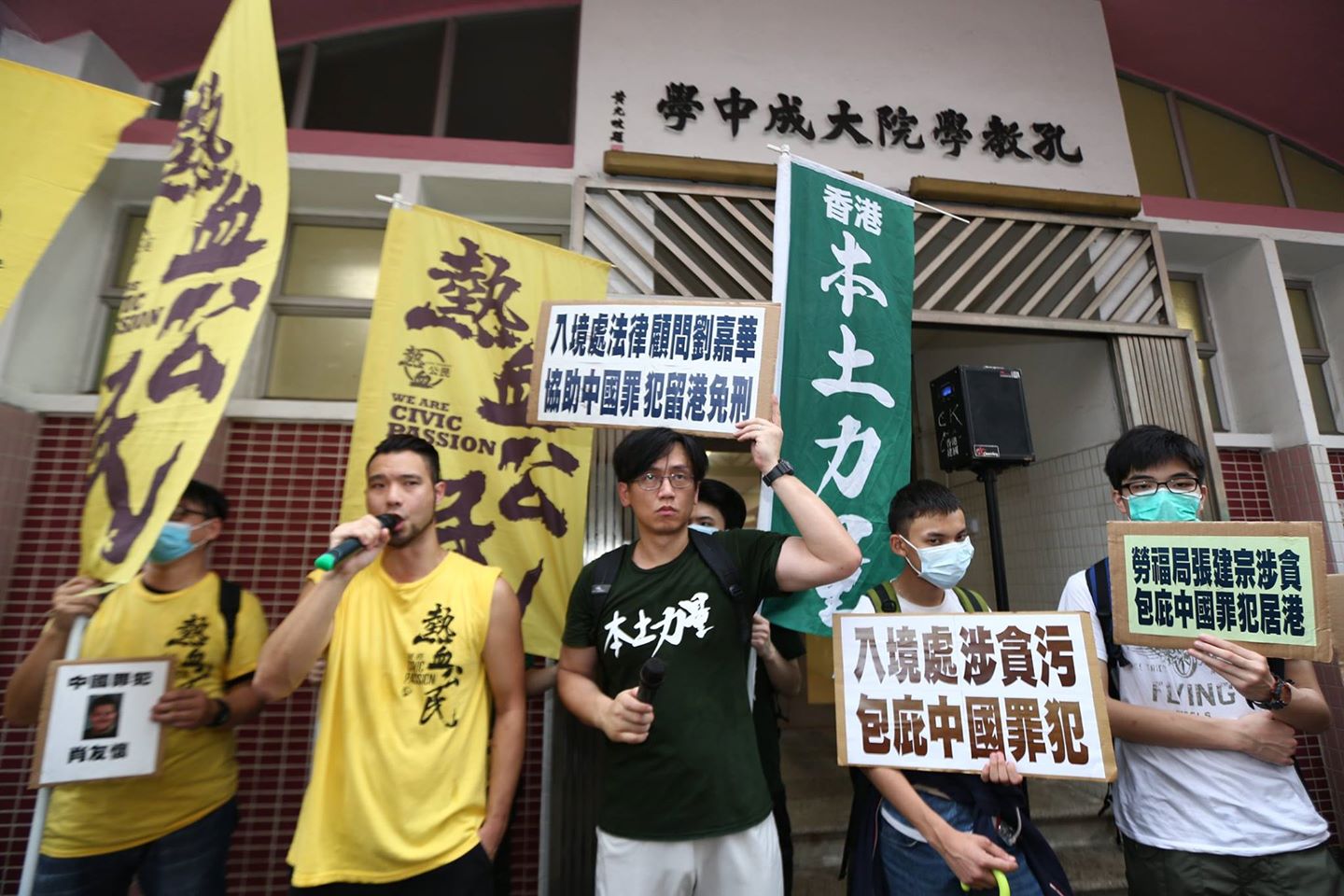
Meanwhile Civic Passion leaders Wong Yeung-tat
and Cheng Chung-tai as well as Hong Kong Indigenous leader Ray Wong are
likely to enter the District Council elections (in 2015) and Legislative
Council elections (in 2016). Therefore they have long gave up those physical
clashes. Even if they did show up, they will quickly disappear after
shouting a few slogans.
Our reporter interviewed a manager of a consumer electronics store in Sai
Yeung Choi Street South. He said: "I hate them to death! They show up almost
every night, so that both mainland and local customers go away. My business
is worse now than during Occupy Mong Kok." The manager said that while the
summer should be peak season for business, their revenues are down 30% this
year. If things keep up this way, the owner may close the store.
(Oriental
Daily) August 24, 2015.
After the Umbrella Movement was
over, a number of "Umbrella Soldiers" plan to participate in the November 2015
District Council elections. They will run against the traditional
pan-democrats. So far, "Umbrella Soldiers" are known to be clashing with
pan-democrats in 14 districts.
This year, the Democratic Party will be
fielding 94 candidates. In 2011, they fielded 132 candidates. In 2007, they
fielded 108 candidates. Based upon previous experience, this time they are
fielding their best and brightest. Of the 94 candidates, 40 are incumbents,
27 have run in previous elections and 27 are first-timers.
(HKG
Pao) August 23, 2015. Also
Wen Wei Po, August 22, 2015.
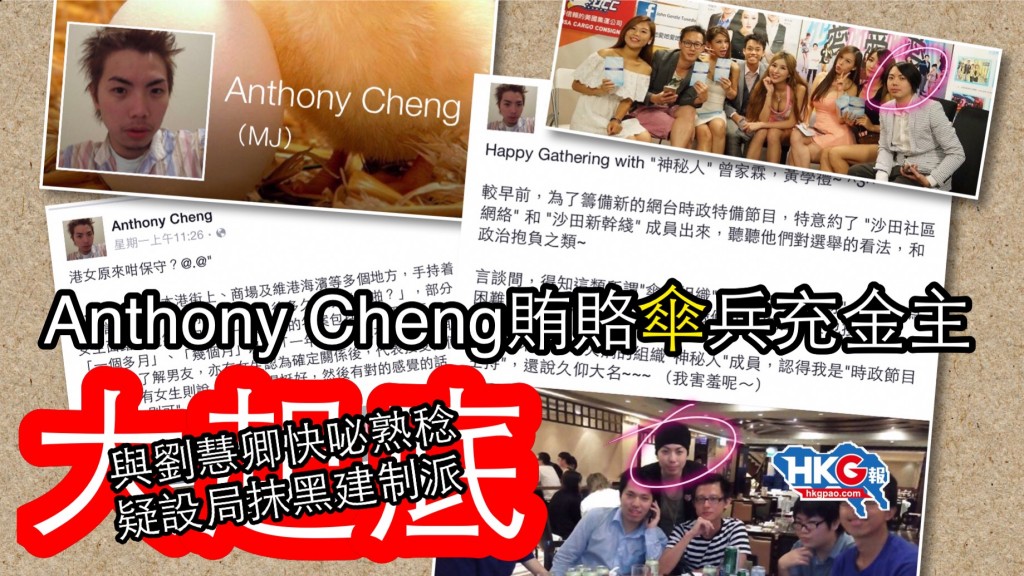
Recently a number of "Umbrella Soldier"
organizations have claimed that they were contacted by a man named Anthony
Cheng and offered to provide about $150,000 in funding to compete in
designated districts which are not controlled by the pro-establishment camp.
One of the organizations Youngspiration
published the contact on their Facebook page. Another organization Shatin
Community Network worked with Cable TV to uncover the case. After the case
was exposed, the Umbrella Soldier organizations fell into mutual acrimony
about people who publicized the case pre-maturely. Meanwhile the individual
Anthony Cheng said that he is an Internet radio host and he wanted to test
the resources of the various Umbrella Soldier organizations for a special
program. That program was scheduled a month from now, but this is now
impossible given the recent developments.
So who is Anthony Cheng? According to our
report, he ran a talk show in which the guests are politicians and
entertainers. Later on, he stopped his production due to a dispute with the
sponsors and now he is making micro-movies (including sending his female
actresses to sell alcohol at his sponsor's bar). Recently, Cheng is a host
at the OurTV website, focusing on women's bust lines and bisexuality.
On his Facebook, he has shown pictures of
Democratic Party chairwoman Emily Lau who is also a host at OurTV as well as
Tam Tak-chi of the League of Social Democrats.
Cheng has hinted that a financier wanted to
take over all the Localists organizations. He hinted that there is a
money-taking procedure in which the applicant provides an "election
participation proposal" to get a 25% advance; another 50% will come after
the applicant files to run in the election; the final 25% will come after
the election. The total amount is $150,000 per district. The applicant does
not have to win, but needs to get 150 to 200 votes (not enough to win but may
affect who the winner is). The applicant does not have to return any unspent
campaign money.
After
Cheng's involvement was exposed, both his Yellow Ribbon and Blue Ribbon
friends "unfriended" him in large numbers.
According to one view, these so-called
Umbrella Soldier organizations were largely unknown until this incident.
Furthermore they did not call the police and chose instead to work with the
media to do an undercover news story. This makes the whole incident look
like a publicity stunt to smear the pro-establishment camp.
(SCMP)
September 26, 2015.
A man has been charged by the Independent
Commission Against Corruption for allegedly offering bribes totalling
HK$550,000 to prospective candidates in the coming district council
election.
Cheng Wing-kin, a 31-year-old waiter, will
appear in Eastern Court this morning. HeÆs accused of offered advantages to
four persons to stand as candidates, or get others to stand as candidates,
in the November polls. He was arrested on Thursday and faces five counts of
corrupt conduct in an election.
The ICAC investigation was triggered by a
complaint. Two of the charges allege that Cheng, between Jul 8 and July 18
this year, offered advantages of HK$400,000 to a person to run for election
in a specified geographical constituency, and to get another person to stand
as a candidate. Cheng is also accused of offering HK$10,000 and two
unspecified sums of money to three persons between July 12 and August 17 to
induce them to get three others to run in three specified districts.
(SCMP)
September 26, 2015.
A waiter in Hong Kong allegedly offered
bribes totalling at least HK$550,000 (US$71,000) to persuade four people to
either stand as candidates in this yearÆs district council elections or find
people who could. Cheng Wing-kin, 31, entered no plea to five counts of
engaging in corrupt conduct at an election during a hearing at the Eastern
Court on Saturday. He was arrested on Thursday.
Magistrate Jason Wan Siu-ming adjourned the
case to November 20 to give the cityÆs Independent Committee Against
Corruption (ICAC) time to can carry out further investigations while
prosecutors seek legal counsel. Wan also granted Cheng bail of HK$3,000 cash
on the condition he surrender his travel documents.
The ICAC launched its probe into the case
after hearing allegations of corrupt conduct during the elections. Cheng is
believed to have contacted a man called Wong Hok-lai between July 8 and 18
this year claiming he could pay him HK$200,000 to stand as a candidate at a
specific constituency for this yearÆs district council elections. Cheng
allegedly offered Wong the same amount if he could find an additional body
to stand in the elections. Cheng was also accused of approaching Tsang
Ka-lam, Wong Chun-yeung and Leung Chung-hang to enlist their help in finding
more candidates. The court heard that he offered unspecified sums to Tsang
and Wong as well as HK$150,000 to Leung.
(SCMP)
'Tip of the iceberg': Warning from pan-democratic parties over 400 suspicious
Hong Kong voter records. August 25, 2015.
Pan-democratic parties flocked to the
election watchdog yesterday to lodge more complaints about the records of
over 550 voters with suspicious or false residential addresses, warning they
could be "the tip of the iceberg".
A flood of cases reported to the
Registration and Electoral Office recently included complaints by residents
of unknown people registering their home addresses for voting in the
district council elections in November. Among new cases yesterday were
voters registering addresses that do not exist, and seven or eight voters
registering as living together in flats of 200 to 300 sq ft. In one case a
voter claimed to be living in a hospital.
Mak Tak-ching of the Labour Party, who led
colleagues to file 300 cases to the office, said such irregularities were
widespread in constituencies including Tsuen Wan, Hung Hom, Sai Wan Ho and
Ma On Shan. "We believe it is only the tip of the iceberg. The electoral
office should take it seriously and proactively launch an investigation,"
Mak said.
Democratic Party community officer Winfield
Chong Wing-fai, whose party reported about 50 suspected vote-planting cases,
accused the office of laxity. "There is one case of a voter who registered a
power distribution transformer station as the home address. This could not
have been accepted in the first place if the office was serious about its
work," said Chong.
The Post has previously reported on voters
claiming they live in hotel rooms, the Cultural Centre, Tsim Sha Tsui, and
parks. Civic Party lawmaker Claudia Mo Man-ching warned that such
irregularities could erode confidence in the election system.
Yesterday was the last day for voters to
check and update their particulars in order to vote in November, and for the
public to report suspicious cases.
An office spokesman said all complaints
would be handled in accordance with the law. A person who gives false or
incorrect information in making a voter registration may face up to six
months in jail and a HK$5,000 fine. Scores of people were convicted of
registering false addresses in 2011.
The district council elections will be held
on November 22. It will be the first general elections since the Occupy
protests and the pan-democrats' rejection of the government's proposed
reform for the 2017 chief executive election. The polls are seen as a key
test of voters' reaction to the pan-democrats' tactics.
Meanwhile, the Privacy Commissioner
reminded candidates not to use voters' personal data for electioneering
activities without their consent. Since 2012 the office has received 200
complaints about such election-related offences. It said the data should be
destroyed after completion of all the electioneering activities.
(SCMP)
District councillors' addresses changed on register, raising fresh doubts on
work of elections watchdog. September 1, 2015.
The elections watchdog is facing more
scrutiny after two district councillors learned their registered addresses
were changed without their consent. The pair affected were Nixie Lam Lam, a
Democratic Alliance for the Betterment and Progress of Hong Kong member of
Tsuen Wan District Council, and Lam Yuk-chun, a non-affiliated Southern
district councillor, said DAB vice-chairman Horace Cheung Kwok-kwan. The DAB
reported the cases to police.
It came to light when Lam checked her
registration status online. Cheung warned that a change of address - which
could be made by anyone with the voter's identity card number and name -
could cause a person to miss a verification letter from the Registration and
Electoral Office, leading to their voter registration being cancelled and
making them ineligible to stand in November's district polls. "It is also a
criminal act for anyone to fill in [a voter registration] with wrong
information," said Ip Kwok-him, a DAB lawmaker who serves with Cheung on
Central and Western District Council.
A series of irregularities have been
spotted in the provisional register, raising doubts about the adequacy of
the office's verification work after a flood of voter fraud cases at the
last district polls four years ago.
Cheung said the DAB had found over 100
irregularities on the register for Central and Western, including 98 cases
of voters claiming to live in commercial buildings or street-level shops,
and 19 of people living in buildings vacant for redevelopment. Voters were
also registered in a demolished building and on the 12th floor of a
10-storey building. Cheung said that instead of relying on letters and
visiting voters to verify addresses, the watchdog should set up a database.
"If a building is demolished or vacated for redevelopment, the Buildings
Department [and the Urban Renewal Authority] would know à The [office]
should collect this information and match it against the electoral roll."
(Oriental
Daily) September 1, 2015.
The Registration and Electoral Office had
previously sent out registered letters to registered voters in order to verify
their addresses. At this time, about 47,000 voters have their registration
voided because they did not respond in time. Together with about 32,000 voters
who are deceased, this means that a total of about 80,000 voters have left the
voter rolls. By district, it appears that Wong Tai Sin at 253 and Kwun Tong at
240 are the most seriously affected. Since District Council elections are
sometimes decided by one or two dozen votes, disenfranchised voters or losing
District Councilors may be filing lawsuits to block the election results.
(Wen
Wei Po) September 2, 2015.
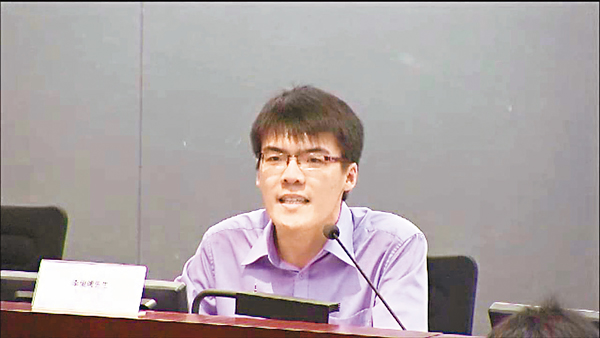
Civic Party's Joshua Li
Voters were supposed to update their
registration information by August 25. Many pan-democratic parties filed
complaints against suspicious voters. In particular, Civic Party's Joshua Li
filed 596 letters of objection against registered voters in the Mei Foo
district (specifically, in Mei Foo Stage 5, Mei Foo Stage 6, Ching Lai
Court, Nob Hill). Most of these objections were based upon either the number
of different surnames per household or the use of seemingly non-existent
addresses. The thresholds that Joshua Li chose to use were lower than what
other political parties are using (to wit, Li objects to four different
surnames in one family and it becomes the onus on that family to prove that
all four persons are (1) real by submitting copies of their Hong Kong ID's
and (2) actually reside there by showing bills with their names and
addresses, etc.).
With so many people being affected and thus
contacted by the authorities for verification, there was a blowback. The
Civic Party has apologized to the real voters who were affected. So far
Joshua Li has withdrawn his objections to 486 of those registered voters.
However, he is persisting on objecting to the remaining households with more
than seven different surnames per household or seemingly non-existent address.
(Oriental
Daily) September 3, 2015.
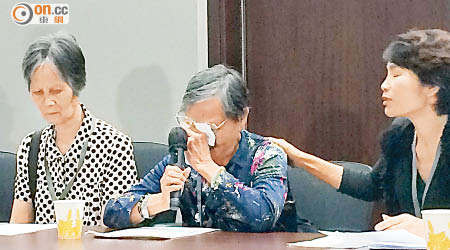
Democratic Party vice-chairman and Shek Yam
district councilor Andrew Wan Siu-kin was accused of mistakenly filing
complaints at the Registration and Electoral Office against more than a dozen voters.
Yesterday Legislative Council Ben Chan
Han-pan and others held a press conference together with four voters. The
four voters were deeply disturbed to receive demands to appear in court to
explain their voter status. One senior citizen burst into tears and said
that she was so fearful that she couldn't eat or sleep.
Ben Chan said that he has received thirteen
citizen complaints so far. Most of these are senior citizens who don't
understand the legal issues and sought his help. As a result, they will have
to appear in court to defend themselves. Chan wonders if someone has been
abusing the system.
Meanwhile Democratic Party vice-chairman
Andrew Wan denies that he is using the system against any persons. He
emphasized that his complaints were completely based upon the validity of
the addresses or the presence of multiple surnames at a single address.
Other political parties make similar complaints, and so the Democratic Party
should not be isolated for criticisms. Wan says that he will apologize to
those voters who were erroneously affected, but only after he receives the
relevant documentation.
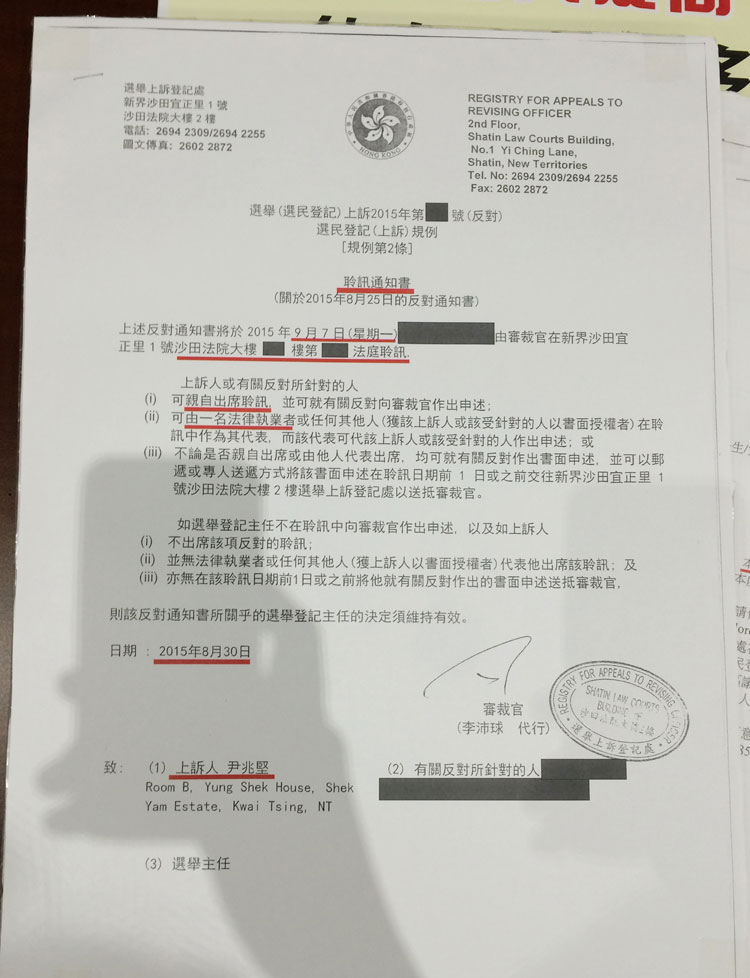
Letter to request court appearance due to
complaint about election registration fraud in which the complainant is
listed as Andrew Wan.
(HKG
Pao) 13 Kwai Ching residents contacted legislator Ben Chan for
assistance. These included members of the neighborhood self-help committee,
presidents and members of the apartment owners' committees, etc. Grandma Lam
has been living in the Kwai Ching district for 15 years. Previously she was
a volunteer for Andrew Wan and the Democratic Party. Recently she became a
volunteer of the rival DAB party. Therefore Andrew Lam filed a complaint
against her to make her lose her eligibility. When Grandma Lam got this
letter, she was "so scared that she couldn't eat nor sleep." Other targets
of Wan's complaints will have to take time off from work to show up in court
to defend themselves.
(Oriental
Daily) September 6, 2015.
Three pro-establishment district councilors
(Lau Kwai-yung of Yuen Long, Lam Lam-tong of Tsuen Wan and Lam Yuk-chun of
Hong Kong Island South) found that some unknown person(s) had changed their
addresses on the Registration and Electoral Office without their knowledge,
and this may cause them to lose their eligibility to run in the district
council elections.
Lau Kwai-yung lived in Tin Hang Estate in
Tin Shui Wai before she got married. Recently she found out that her home
address has been moved from Yuen Long to Tin Shui Wai. She thinks that
someone is using a trick to make her ineligible to run in the election.
Fortunately she found out before the deadline. Yesterday, she found out from
the Registration and Electoral Office that someone had forged her signature
to fill out a change-of-address form. She intends to file a police report.
(Hong
Kong Free Press) September 7, 2015.
A magistrate has slammed the Registration
and Electoral Office for incompetence after a court reviewed hundreds of
complaints relating to fraudulent or bogus particulars arising during the
voter registration process. Many of the errors were a result of the officeÆs
incorrect inputting of data, the Sha Tin MagistratesÆ Court heard on Monday.
Around twenty citizens accused of
having provided fraudulent details attended court to defend themselves. In
one case, it was found that a single address belonged to people with three
different surnames because the voter, Ms Ho, lived with her husband and
maternal grandmother, all of whom have different surnames. In another case,
the court heard that people with five different surnames were found to be
registered to one address because those who had moved away did not renew
their details.
Magistrate Andrew Ma criticised the
Registration and Electoral Office for causing confusion among voters and
wasting the courtÆs time and resources by inputting voter data incorrectly.
The magistrate also said that some of the suspicious cases could be the
doing of political groups who want to prevent those with opposing views from
voting. Ma urged the office to address the issues immediately and
praised voters for fulfilling their duty as citizens by highlighting the
discrepancies through legal processes.
The voters were assisted by Legislative
Councillor Ben Chan Han-pan, of the pro-establishment DAB party, who said
that many of the accused were innocent senior citizens unfamiliar with the
regulations and procedures related to the election process. He suspected
that some people had been making complaints maliciously and abusing the
reporting mechanism.
Under current procedures, the Registration
and Electoral Office has to refer notice of objections made by complainants
to a judge, who will resolve the matter through a hearing. The voter whose
particulars were being questioned can then personally appear in court or act
through a lawyer to confirm their registered address.
(dbc)
September 8, 2015.
The Registration and Electoral Office
stated that they will investigate when an address contains seven or more
voters, and/or five or more different family names. They believe that Civic
Party's Joshua Li's four different family names is too low a threshold. The
magistrate concurred and said that the right to vote cannot be deprived
unless there is evidence of voter fraud.
(Oriental
Daily) September 8, 2015.
Joshua Li lodged a complaint against a
family with four voters having different family names. The subject appeared
in court to explain that the family consisted of a married couple with their
son and daughter-in-law who have different family names. The court rejected
the complaint. Civic Party secretary-general Lay Yan Piau had accompanied
Joshua Li to court, and he apologized outside the court to the affected
family.
(Ming
Pao) September 8, 2015.
The resident with four different family
names living in the same address in Mei Foo appeared at court in person. The
female head-of-house thought that it was hilarious. She pointed out that
she, her husband, her son and daughter-in-law and her daughter and
son-in-law live together. The magistrate dismissed the complaint against
her.
(Wen
Wei Po) September 10, 2015.
Six persons from five families in Shek Yam
district have gone down to file a complaint against Democratic Party
vice-president Andrew Wan and others. These residents said that there was no
way that Wan did not know that they still live there. After all, Wan's
assistant came last month to contact them. Therefore there was absolutely no
reason for Wan to report that they filed false address information to the
Registration and Electoral Office. Under Hong Kong law, it is a crime to
file false claims about the eligibility of a voter.
There six persons have also released a
statement. Because Wan filed a complaint against them, they had to respond
to the Registration and Electoral Office in a very short time and attend the
court hearing. Furthermore, they have been harassed in person, by telephone
calls and text messages. They were told to "watch themselves" and "don't
overdo this." "Recently, some people have openly said that we are making
something out of nothing and making unfounded charges. Even more ironically,
they wondered why we didn't call the police. That is why we are angry."
The statement continued: "Everybody makes
mistakes. The matter would be over if a sincere apology is offered. But
someone insists on not apologizing and refuses to let the matter end. They
keep shirking responsibility and in fact turn around the table. We are
vexed. We are forced to ask the police for help, so that the law enforcement
agencies can get to the truth."
(Oriental
Daily) September 25, 2015.
Yesterday, the Democratic Party chief
executive Lam Cheuk-ting called a press conference over their discovery of a
number of suspicious voter registration records. They said that they just
studied the official voter registry released today and found that a number
of voters who were deemed to be suspicious (usually too many different
family names at the same address) by the Registration and Electoral Office
have now been split into two or three different addresses elsewhere in the
district. The press conference was scheduled at 4pm at the Legislative
Council.
When the reporters arrived, they saw
workers quickly removed the banners on the back wall about the press
conference. Soon Lam Cheuk-ting appeared and confessed that they made a
mistake when they compared the old and the new voter registries.
Specifically, when they copied the information from one spreadsheet to the
other, they shifted one row so that the new and old were no longer aligned
correctly. Therefore Lam said that the press conference has been called off,
and he apologized at least six times to the reporters who showed up.
(Hong
Kong Free Press) November 19, 2015.
Two people were charged by the Independent
Commission Against Corruption (ICAC) on Wednesday with conspiracy to accept
a bribe of up to HK$200,000 as inducement to stand in SundayÆs District
Council elections.
Thirty-two-year-old renovation worker Ku
Ka-ho and merchant Chan Kin-loong, 37, face a joint charge of conspiracy to
engage in corrupt conduct at an election, contravening the Elections
(Corrupt and Illegal Conduct) Ordinance and Crimes Ordinance.
The charge alleges that between July 12 and
August 9, Ku and Chan, together with Anthony Cheng Wing-kin and one other
person, conspired for Ku to engage in corrupt conduct by accepting an
inducement from Cheng of between HK$150,000 and HK$200,000.
The sum was intended for Ku to
persuade Chan to stand as a candidate in a specified geographical
constituency. Chan ultimately did not put himself forward as a
candidate. Cheng, an online TV host, has previously faced charges of
bribery.
The defendants have been released on bail
and will appear at the Eastern MagistratesÆ Court on Friday afternoon for
mention.
On the same day, the ICAC also
charged a registered voter in the 2015 Rural Representative Election with
accepting a bribe of HK$2,000 for her to vote for a particular candidate and
to have her mother vote similarly. Ho Ching-yi, 27, unemployed, faces two
counts of engaging in corrupt conduct at an election.
Ho, an indigenous inhabitant
of Wong Nai Tun Tsuen in Shap Pat Heung, Yuen Long, was registered to vote
in the 2015 Rural Representative (Indigenous Inhabitant Representative)
Election for Wong Nai Tun. She has been released on bail and will appear at
Tuen Mun MagistratesÆ Court on Thursday for plea.
Internet comments:
- Usually, the District Council elections
are a case of pan-democrats versus pro-establishment candidates. The Factor
X this year comes from the post-Occupy Central "Parachutists". These are the
Young Turks who came out of Occupy Central. They hate the pro-establishment
camp, but they also think the traditional pan-democrats are sell-out.
Therefore they will run to gain political power at the grassroots level,
namely the District Councils.
(Ta
Kung Pao) August 25, 2015.
According to Democratic Party
vice-chairman Andrew Wan Siu-kin, they will be sending forth 94 candidates
in the District Council elections. This is less than the 132 last year,
but want to use their limited resources on those candidates who have a
chance. Last time, the Democratic Party chairman Albert Ho Chun-yan had to
resign after so many of their candidates lost.
Wan said that there are about 200
pan-democrat candidates in the field, of which there are at least fourteen
cases where post-Occupy Central "parachutists" are also running. Of these,
eight are in districts in which Democratic Party candidates are running.
Wan is pessimistic about reaching compromise, because the parachutists'
idea about mediation is that the Democratic Party candidates should
withdraw. Wan says that their party will field the candidates regardless.
- Joshua Li was forced to withdraw 486 of
his 596 complaints? Only 2,000 to 3,000 people will likely vote in his
district, but he wants to disqualify one-fourth of them? What was he
thinking when he made the filing? Where were the grown-up supervisors?
-
What are his prospects after alienating/offending a quarter of the voter
base before the voting even begins? And those voters have friends and
relatives living in the same district too.
- If the complaints against registered
voters are systematically spread across the board, there may be no reason for
concern. But if you are profiling by complaining against some and ignoring
others, you can gain an advantage.
Here is an example of how it is done: The
most typical profile of the pan-democratic voter is young, high-income and
high education. Voter registration data only tell you about gender and age.
Census information tells you about median income by sub-districts. So you
target older voters in poorer sub-districts. You don't have to purge
them from voter rolls. You can simply intimidate them by making the voting
process hell (namely, having to appear in court to prove that you are who
you are). That will give you an advantage.
This is just the sort of thing that
highly-educated people can come up with.
- A family with four different surnames?
You live with your mother, mother-in-law and wife using their maiden names
and you are criminalized.
- How do prove that you are yourself? That's more Orwellian than Orwell. But
if you can't do that, Andrew Wan won't withdraw his complaint against you
and you will never be able to vote.
- Andrew Wan can make fun of rhe
pro-establishment camp of buying votes with their snake dinners, vegetarian
meals, moon cakes and rice dumplings. But what does he do himself? A
discount 2-day trip for Kwai Ching senior citizens to Zhuhai (People's
Republic of China).
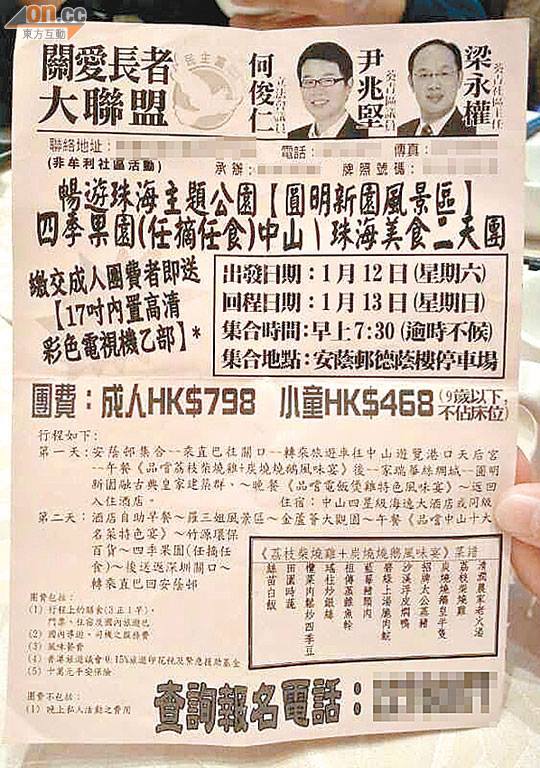
- Why is Andrew Wan so aggressive?
(SCMP)
Hong Kong's pan-democrats look to regain control in Kwai Tsing in November
polls. September 7, 2015.
To pan-democrats, Kwai Tsing is a
sympathetic oasis of voters as it is the only one out of the 18 districts
where the camp has the edge over their pro-establishment opponents.
However, they do not hold the top posts
of chairman and deputy - as six appointed seats in the 35-member council
tipped the balance of power to the government-friendly side, even though
democrats won 15 out of 29 directly elected seats in 2011.
But as appointed seats will be abolished
this year, the prodemocracy camp is now hoping to extend its advantage in
the November polls and turn Kwai Tsing into the city's only district
council that is not dominated by Beijing loyalists - a position it has
held in the past.
Democratic Party vicechairman Andrew Wan
Siu-kin, a Kwai Tsing district councillor, said the camp could realise the
goal should it beat its opponents in two key constituencies - On Ho and
Ching Fat. Opinion polls indicate that Democrat candidates are leading
there.
"But it's a very, very tough battle," Wan
admitted.
"The pro-establishment camp has been
pouring way more resources into districts like Kwai Tsing - or Sham Shui
Po - where the pan-democrats exert significant influence. They don't
really care much about the districts where Beijing loyalists already enjoy
the absolute advantage."
Kwai Tsing has long been regarded as the
bridgehead for the pan-democrats. They won 23 out of 28 popularly elected
seats in 2000. But over the past decade, the margin between the two camps
has been narrowing, leaving the pan-democrats just one seat ahead in the
last polls.
Wan, who beat his opponent by more than
1,000 votes in the 2011 race, said the current election atmosphere was the
worst since he first ran in 2003.
He accused pro-Beijing aspirants of
distorting the councillor-voter relationship by handing out extravagant
free gifts, which he said was no different from indirectly "bribing
voters".
"I also give out free gifts - such as
moon cakes, Chinese New Year gift bags and festive dumplings for the
Dragon Boat festival," he said. "But now the Beijing loyalists do not just
do it at festivals but throughout the year, giving out free bags of rice
weighing several kilograms and even electronic appliances à I hope people
can rate the aspirants by their ability and not by how many free gifts
they offer."
Another district councillor, Tam Wai-chun
of the Business and Professionals Alliance, said the council could be
controlled by pan-democrats if her allies failed to stay united. "The
pro-establishment camp does not necessarily have better electoral
coordination as not many of us are in the same boat," she said.
In some constituencies, she said, more
than one Beijing loyalist had indicated an intention to run, which could
allow pan-democrats to reap the benefits of a multi-candidate contest.
Tam also hit back at Wan's accusation
about giving out gifts, saying pan-democrats had done the same.
- Andrew Wan has a problem for his own
re-election campaign and that is why he needs to do something to avoid
getting pinned down on his negative image. (The
Sun) September 4, 2013.
Last year, the Democratic Party felt that
Andrew Wan was capable for running for Legislative Councilor, but he
suddenly withdraw. Rumors abounded at the time that he was carrying an
extramarital affair with a woman.
So now Andrew Wan has come out to defuse
the time bomb by telling the media about this extramarital affair. He
tells us that about five years ago before the 2008 Legco elections, he had
just joined the Democratic Party. At the time, his marital situation was
terrible as the couple kept quarreling all the time. At the time, he got
to know a woman in her 20's and they carried on an affair for about six
months. At the time, he had lost his mind and became totally unaware that
this was wrong. He even let friends see the two openly. After six months,
he realized that he couldn't continue. So he broke up with the woman and
told his wife about the affair. His wife was very mad but eventually
forgave him.
It is hard to say whether the voters will
forgive him. He has come out clean with the media in the hope that they
will. Otherwise, he may even lost his District Council position and thus
any chance of reaching the Legislative Council.
In politics, your personal interest comes
ahead of your party's interest which is ahead of your beliefs and
principles. In order to bury his own negative image, Andrew Wan is willing
to risk his party's and his pan-democrats' chances with an action that is
generating negative publicity.
- Two pictures tell a thousand words about
who is winning this public relations war.
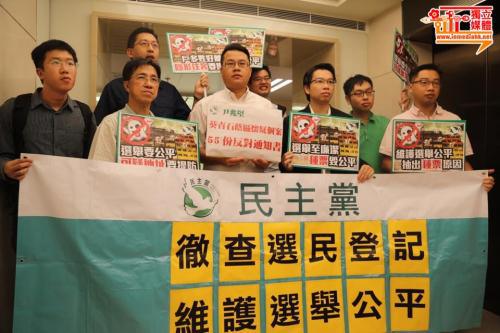
Democratic Party led by vice-chairman Andrew Wan:
Democratic Party
Thorough investigation of voter registration
Protect election fairness
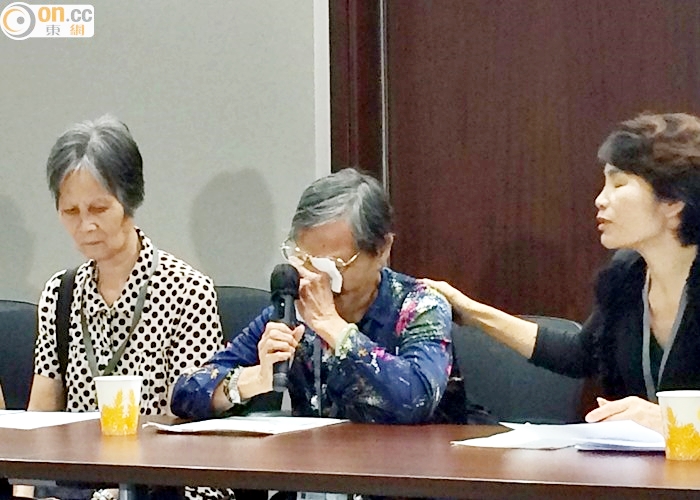
Crying grandma who used to work as a volunteer for the Democracy Party's
Andrew Wan. Why is she scared? She's been receiving letters and phone calls
from strangers, her apartment does not have a steel gate and she thinks
someone might break the door down and kill her.
- Interestingly, Andrew Wan had a photo
taken at Occupy Admiralty with the celebrity lifeguard who was a full-time
marshal while on paid sick leave from the government. On his t-shirt are the
words: "Eggs against the high wall, fasting for universal suffrage." The
grannies are the eggs and Andrew Wan is the high wall here.
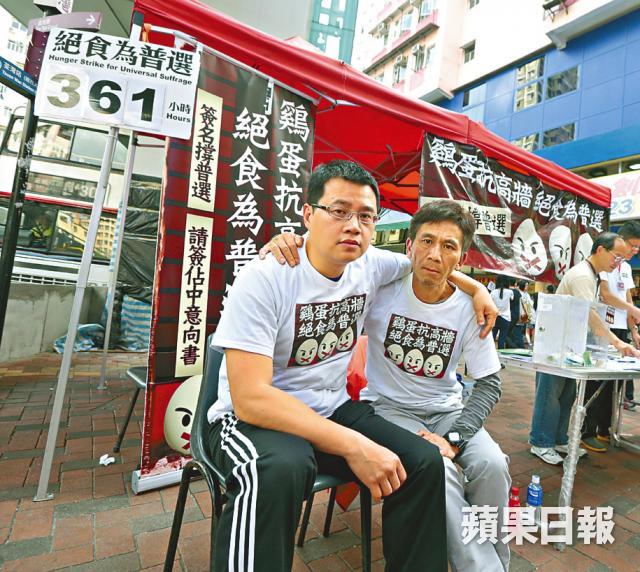
- Andrew Wan's nickname is "Fat Boy". His fasting was
unsuccessful, both for himself and universal suffrage. He is as fat as ever
and universal suffrage is nowhere thanks to the veto by the pan-democrats.
- (Wen
Wei Po) September 14, 2015.
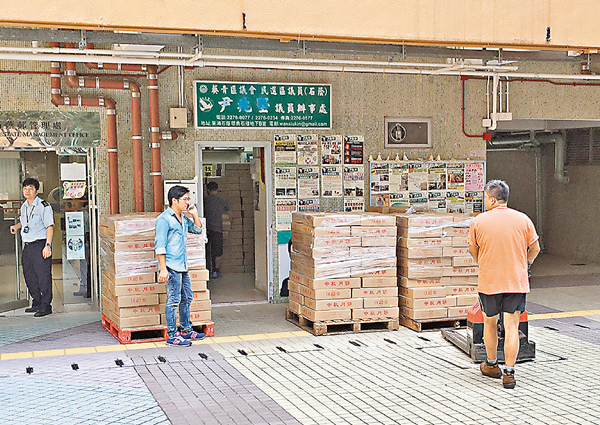
Yesterday a citizen told us that a large
truck brought a large amount of moon cakes to the office of Andrew Wan.
Democratic Party members Leung Wing-kuen and Lau Chi-kit were in charge of
taking delivery. A man moving the moon cakes used a cart with Lau Chi-kit's
telephone number printed on it. In the 2011 District Council elections,
Leung Wing-kuen lost in the On Yam district to FTU's Leung Chi-wing, while
Lau Chi-kit lost in Ching-Fat district to the unaffiliated Poon Siu-ping.
According to the photo provided by the
citizen, three pallets were loaded with boxes printed as "Mid-Autumn Festival Moon
Cakes" and "1x40". This photo shows so far three pallets, with a total of (3
pallets) x (10 layers per pallet) x (4 boxes per layer) x (40 moon cakes per
box) = 4,800 moon cakes.
This citizen said that whereas the
Democratic Party likes to accuse the pro-establishment camp of using "Snake
dinners, vegetarian dinners, moon cakes and rice dumplings" to buy votes and
win elections, they are now also giving away large numbers of moon cakes
themselves. "I think that the Democratic Party is courageous in criticizing
others people, but incapable of criticizing themselves. They claim to be
poor, but where do they get the money to give away so moon cakes? Suppose
one moon cake costs $10. 4,800 moon cakes would add up to $48,000."
This citizen said that in recent days,
Andrew Wan has gotten a rotten reputation for harassing registered voters in
Shek Yam district. So maybe he wants to give away large numbers of moon
cakes so that the residents may forget his evil deeds.
This citizen said that Andrew Wan's office
has a notice that he will give away packets of rice on September 30. "How
so! The District Council election filing begins two days later. Is this
bribery?" According to the information, the rice distribution is handled by
Thailand Buddhist Culture, but people can get their tickets at the address
Shek Yam Estate Yung Shek Building Ground Floor B Room. That happens to be
Andrew Wan's office.
-
Voter suppression is a universal human right and an international
standard. It is more common than civil nomination of election candidates.
(EJinsight)
August 19, 2015.
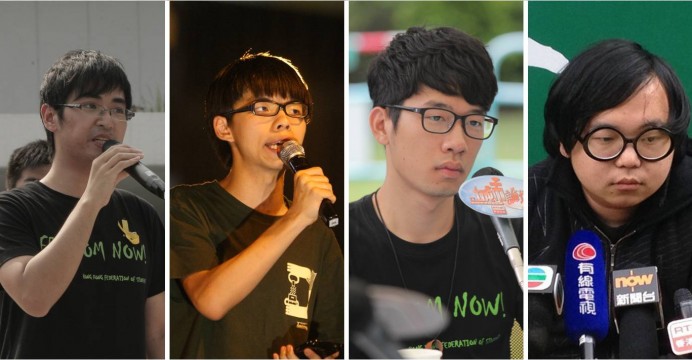
Alex Chow, Joshua Wong, Nathan Law and Derek
Lam
Four
student protesters are facing indictment for storming the Central Government
Offices during last yearÆs democracy protests.
They have been told by the police that they
will be charged in court by the end of the month.
Apple Daily is reporting that Joshua
Wong, convenor of student activist group Scholarism, will be indicted for
taking part in an illegal assembly and inciting others to participate.
Alex Chow, then leader of the Hong Kong
Federation of Students (HKFS) and its sitting secretary general, Nathan Law,
will be prosecuted for either offense. A fourth protester, Scholarism member
Derek Lam, faces a charge of common assault.
The
charges stem from an incident in which activists climbed over a perimeter
wall and occupied the East Wing forecourt of government headquarters on
Sept. 26 last year, two days before the protests began.
All four, who were held briefly under ôarrest by appointmentö, said they
have no regrets.
Law,
who faces a charge for inciting others to join an unlawful assembly, said in
a Fecbook post Tuesday that the government does not distinguish between
social activists and common criminals. ôNo wonder the government sent cops
from the Organized Crime and Triad Bureau when Scholarism members set up
booths in the streets.ö
Chow
called the charge against him political revenge, adding three other key HKFS
members have not received calls from the police about any legal action.
Separately, Wong wrote on Facebook that
itÆs a ôjoke that citizens have to face prosecution for entering an open
public spaceö. He said he hopes the democracy movement will find a new
direction to stay alive as the first anniversary of the Sept. 28 protests
draws closer.
(SCMP)
Trio of Occupy Central student leaders charged over protest that sparked
79-day movement. August 27, 2015.
Three student leaders of last yearÆs Occupy
protests in Hong Kong were charged by police today for their roles in a
protest last year at government headquarters in the days leading up to the
start of the movement.
Scholarism leader Joshua Wong Chi-fung,
Federation of Students secretary general Nathan Law Kwun-Chung and his
predecessor Alex Chow Yong-kang attended police headquarters in Wan Chai
this morning to accept the charges. Wong said he was charged with taking
part and inciting others to take part in an unlawful assembly. Chow said he
was charged for taking part in an unlawful assembly while Law was charged
for inciting others to take part in it.
The trio were among a group of students who
broke into the forecourt of government headquarters in Admiralty on
September 26 last year. The break-in came after students staged a class
boycott for several days outside the building in protest against BeijingÆs
stringent framework on political reform. The break in triggered the 79-day
Occupy protests two days later. Speaking before entering police headquarters
this morning, Wong said: ôThe break in was the best decision I made in the
last four years.ö
Referring to the forecourt of the
government headquarters, Wong said previous protests had been held there
without incident. ôæCivic SquareÆ had been a place where we gathered freely
to protest against the national education curriculum and the free television
licence decision. We were only trying to get into that place ... So this is
a political prosecution,ö he added.
Wong declined to say whether he would plead
guilty, but Law dropped a strong hint that he would not. ôWe are jumping
into this procedure today to expose [the injustice] in it. When the law is
used to suppress the people, we will not bow down ... and show remorse or
apologise just to get a milder penalty,ö Law said.
The activists will attend court on
Wednesday.
WongÆs lawyer Michael Vidler said he is
considering asking the court to end the legal proceeding permanently because
it was wrong to prosecute 11 months after the incident.
About 100 activists, including pan-democrat
lawmakers, gathered outside police headquarters to show their support for
the trio.
(EJinsight)
Joshua Wong charged amid cries of persecution. August 28, 2015.
Hong
Kong student leader Joshua Wong and two other democracy protesters were
formally charged with illegal assembly Thursday amid cries of political
persecution from their supporters.
Police pressed charges against Wong, founder
of student activist group Scholarism, as well as Alex Chow and Nathan Law,
former and sitting chairman of the Hong Kong Federation of Students. They
will stand trial in Eastern MagistrateÆs Court on Sept. 2, accused of taking
part in an unlawful assembly and inciting others to participate, according
Apple Daily.
Supporters holding yellow umbrellas, symbol
of last yearÆs street protests, chanted anti-police slogans as the trio
arrived at police headquarters in Wan Chai for booking formalities.
Chow
said the trial is an opportunity to reiterate the values of the Umbrella
Movement. But simply pleading guilty will cut short the civil disobedience
campaign, he said. Chow said they plan to illustrate in court the brutality
of the government and how it failed to safeguard the peace and harmony of
society. ôThe Umbrella Movement
started when the police unleashed tear gas bombs, which subsequently
prompted hundreds of thousands of people to take to the streets,ö Chow said.
He said those who ordered the use of tear gas should be prosecuted.
(SCMP)
Case against Occupy protesters including Joshua Wong æshouldnÆt have taken a
year to get to courtÆ. September 2, 2015.
A magistrate yesterday told prosecutors it
should not have taken them so long to bring Occupy protesters to court, as
student leaders from the movement including Joshua Wong Chi-fung appeared
before her almost a year after the pro-democracy protests began.
Principal Magistrate Bina Chainrai was
speaking to the prosecutor in charge of the case against student Chui
Tsz-chun, one of eight defendants pleading not guilty at Eastern Court to
several charges related to events a day before the Occupy protest got into
full swing in September.
The prosecutor said he would like to see
the case dealt with soon as it was ôstraightforwardö, to which Chainrai
replied: ôIf it is pretty straightforward, it should not take a year to
prosecute.ö
In court yesterday, former Federation of
Students secretary general Alex Chow Yong-kang, 25, faced one count of
taking part in an unlawful assembly on September 26 and 27, while his
successor, Nathan Law Kwun-chung, 22, faced one charge of inciting others to
take part in an unlawful assembly on those days. Wong, 18, the convenor of
student activist group Scholarism, faces both charges over alleged offences
on September 26.
A protest outside government headquarters
in Admiralty last September resulted in demonstrators storming the space
outside the complex known as ôCivic Squareö, but the court has not heard
whether the charges relate to those events.
However, Wong, when asked to make a plea,
said: ôCitizens have the right to enter Civic Square.ö
Chainrai replied that the courts were not
the place to %express his political views.
Wong was represented by Randy Shek, while
Alvin Yeung appeared for the other two. Five other protesters û Chau
Kwan-ting, 29, Ngan Chin-fung, 24, Wong Ho, 35, Chui, 17, and ScholarismÆs
Lam Shun-hin, 22 û each face one count of common assault of policemen and
security guards outside government headquarters and the Legislative Council
on the same two days.
The magistrate adjourned the case against
Joshua Wong, Chow and Law, which involves 51 witnesses, to October 30 for a
pre-trial session. The rest are scheduled to attend their pre-trial session
on October 5.
Internet comments:
- This case is a no-brainer.
Here is evidence in the form of the TVB news report (
https://www.youtube.com/watch?v=AyLqUrjlIpE)
0:23 Joshua Wong: I am now
calling everybody let us all charge together into Civic Plaza.
0:32 Nathan Law: Everybody charge into Civic Plaza. The vanguard is already
charging into Civic Plaza.
That would be the incitement.
Their presence in Civic Plaza would be the
participation in an unlawful gathering. The police warned them that this was
an unlawful gathering before arresting them.
-
The relevant law is this:
Cap 245 Public Order Ordinance s 18 Unlawful assembly
(1) When 3 or more persons, assembled
together, conduct themselves in a disorderly, intimidating, insulting or
provocative manner intended or likely to cause any person reasonably to
fear that the persons so assembled will commit a breach of the peace, or
will by such conduct provoke other persons to commit a breach of the
peace, they are an unlawful assembly.
(2) It is immaterial that the original assembly was lawful if being
assembled, they conduct themselves in such a manner as aforesaid.
(3) Any person who takes part in an assembly which is an unlawful assembly
by virtue of subsection (1) shall be guilty of the offence of unlawful
assembly and shall be liable-
(a) on conviction on indictment, to
imprisonment for 5 years; and
(b) on summary conviction, to a fine at level 2 and to imprisonment for
3 years.
Whether Civic Plaza is "open public
space" is not germane to the case.
- Somebody is not pleased but for other
reasons:
(Oriental
Daily) September 1, 2015
Roman Catholic Church Cardinal/Bishop
Emeritus Joseph Zen Ze-Kiun said that he was "ashamed" that he has not
been "contacted for an appointment to be arrested." He questioned
whether the law is equal for everyone.
Who gives a fuck about a has-been and/or
nobody? He does, obviously. Nobody else does, though.
- Joshua Wong said ôit is a joke that
citizens have to face prosecution for entering an open public spaceö.
--- The Legislative Council building is an
open public space, therefore citizens can enter or leave at will.
--- Government House is an open public space, therefore citizens can enter
or leave CY Leung's bedroom at will.
--- The Tsing Ma Bridge is an open public space, therefore citizens can
enter or leave at will.
--- The Hong Kong International Airport is an open public space, therefore
citizens can enter or leave at will.
... Anyway, the general idea is that you can enter or leave any place you
want to as soon as you declare it to be "open public space." That was the
theoretical premise of Occupy Central. Democracy is so wonderful.
- Joshua Wong lives in South Horizons on Ap
Lei Chau. Since the Ap Lei Chau Bridge is open public space, I can occupy it
and stop all traffic. Then Joshua Wong won't be able to go anywhere.
(HKG
Pao) August 20, 2015.
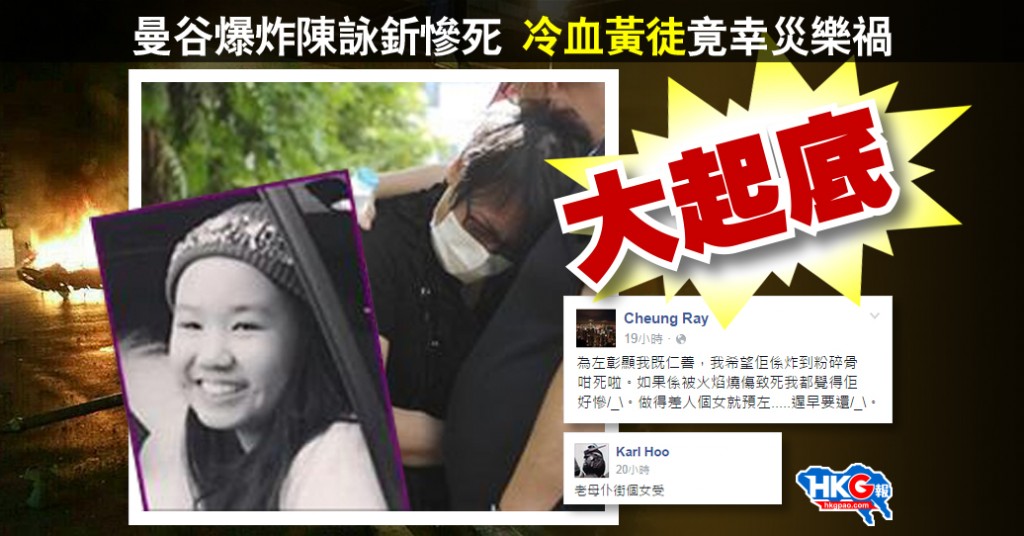
19-year-old British law student and Hong
Kong resident Vivian Chan Wing-yan was among those killed in the Bangkok
bombing. It was disclosed that her mother was a former senior inspector in
the Hong Kong Police force.
On Facebook, a user named Cheung
Ray wrote: "In order to demonstrate that I am kind-hearted, I hope that
she was blown to smithereens when she died. If she were merely burned to
death, I would still think that it was terrible. When you are the daughter
of a police officer/_\, you know that you are going to have to pay for it
sooner or later/_\."
(HKGPao)
August 31, 2015.
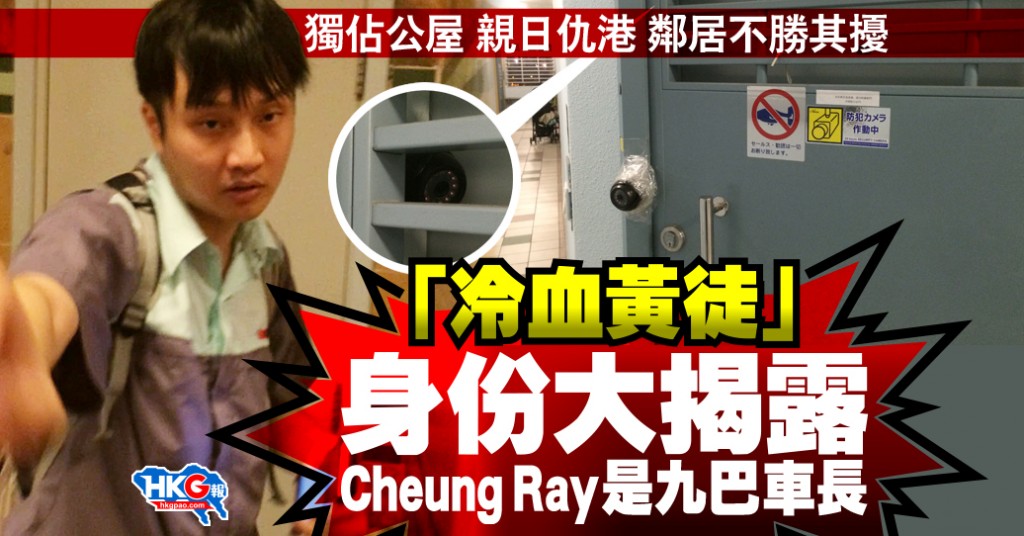
Earlier cold-blooded Yellow Ribbon Cheung Ray
said that British law student and Hong Kong resident Vivian Chan Wing-yan
deserved to die because her mother was an ex-policewoman. As a result,
Internet users launched a campaign to ferret out the identity of Cheung Ray.
They said that the information points to Cheung Ray being "City University
student Cheung Man-po." Cheung is about 30-years-old and currently works for
Kowloon Motor Bus as an assistant. He lives by himself in a public housing
unit in Tin Shui Wai. His political position is pro-Japan and anti-Hong
Kong. He has links to Civic Passion, Hong Kong City-State and Hong Kong
People Online.
Our reporter went to Cheung's
apartment in Ching Moon House, Tin Ching Estate in Tin Shui Wai city, Yuen
Long District. We were there past midnight, and Cheung Man-po just came back
from work while wearing a Kowloon Motor Bus uniform. Our reporter politely
identified himself and asked from six feet away why Cheung made those
cold-blooded remarks about Chan Wing-yan? Cheung immediately looked scared and
dashed into the lobby. He tried to evade, ran into the stairs, returned to the
lobby and told the reporter: "I don't know you. I am going to call the
police!" He seemed to have forgotten how much he hates the police. He demanded
the building staff to give him a phone to call the police. The staff asked
him, "Why don't you use your own mobile phone to call the police?" Finally the
staff member gave Cheung a phone. Cheung picked it and put it down. Then he
dashed into the elevator.
Earlier our reporter went to his apartment and pressed the doorbell many
times without getting any response. The door was locked, with the warning:
"Do not press the door bell or knock on the door unless you are a postman or
courier." There were also two close-circuit television cameras directed
against the outside, so that everyone walking in the passageway will be
videotaped.
We learned that Cheung lives
there by himself. So how does he get a public housing unit for himself? We
have initiated an inquiry with the Department of Housing on this matter and
are waiting to hear from them.
We have also spoken to other residents on the
same floor. They said that Cheung is a weirdo who comes and goes at odd
hours, and many neighbors have not seen him in years. Those who got to know
him have mostly "unhappy experiences." Whenever it rains, Cheung hangs out
his umbrella outside to dry with a threatening sign: "If you take my
umbrella, your whole family will die terribly." Earlier this year, Cheung
left large bags of garbage outside his door to obstruct the passageway. He
refused to act in spite of many advisories and eventually the police had to
be summoned.
During the
Occupy Central Period, Cheung started to post photo "reports" from the
scene. He said that "he was moved to tears by the unity." He was in
Admiralty, he was in Mong Kok, he was very active. He said that "we can win
only if we drive the police crazy" and "we'll buy guns from the western
countries." At the July 1, 2014 march organized by the Civil Human
Rights Front, his group The Yasukuni Shrine
Reverence and Adoration Association held up the Japanese national flag in
parade.
Previously
Cheung Ray has called the Chinese "Chinamen", said "The Nanking massacre
is a piece of fiction" and "We ask the joint Japanese-Taiwanese Allied
Armies to take over Hong Kong and kill all the Hongkongers!" Is such a
person a mental patient? Is he dangerous to society? Since he is a Kowloon
Motor Bus employee, should passengers be concerned? That is a question that
Kowloon Motor Bus will have to answer.
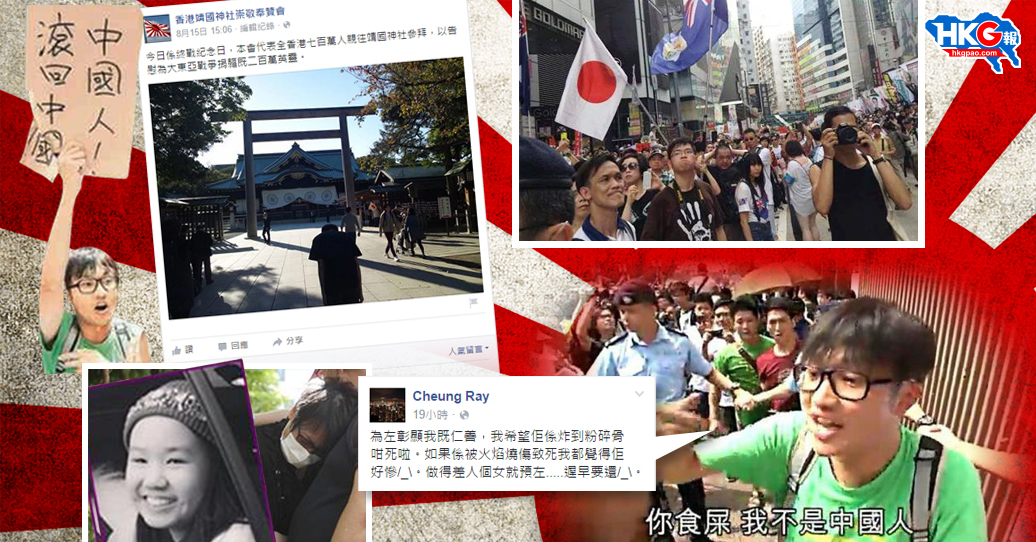
Video:
https://www.youtube.com/watch?v=tyHA6I8JAUI
Internet comments:
- Cheung Ray said smilingly on
television: "For me, the Chinese people is a derogatory term."
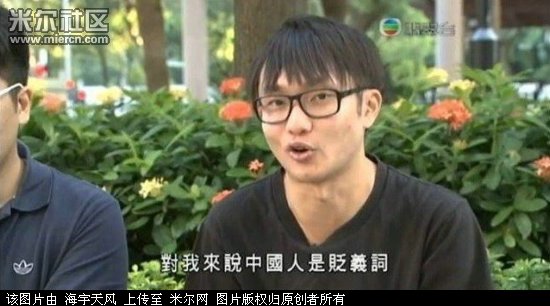
- Cheung Ray lives in a public housing unit provided by the Department of
Housing of the Hong Kong Special Administrative Region government of the
People's Republic of China. He holds an identification card issued by the Hong
Kong Special Administrative Region of the People's Republic of China,
identifying him as a citizen of the People's Republic of China. If he finds
this intolerable, he can renounce his Chinese citizenship, apply for a
Japanese passport, give up his public housing unit and move to live in a tent
underneath a highway overpass.
- This video:
https://www.youtube.com/watch?v=sS0PImXtMvM Cheung Ray is allegedly the
green-shirt guy.
0:07 (Man in white) If you keep raising the placard this way, I am concerned
about your personal safety.
0:10 (Man in green) It does not matter, because the police will provide
protection.
0:13 (Man in white) Everybody loves their country. Everybody is ...
0:14 (Man in green) I love your mother!
0:19 (Man in white) You and I are both Chinese. We are both Asians.
0:22 (Man in green) You eat shit! I am not Chinese!
- Even more extreme than the typical Yellow
Ribbon. While the typical Yellow Ribbon calls the police dogs, Cheung Ray
says that they are Chinamen. However, they are all the same when they get
into trouble themselves -- they call the police (uncles, not dogs) for help!
- Cheung Ray meets all the qualifying requirements for being a Young
Wastrel:
Normal times
[X] Talk tough
[X] Talk rough
[X] Talk revolution
[X] Talk insurrection
[X] Talk extermination of all locusts
Troubled times
[?] Live off social welfare
payments (due to physical/psychological disability, etc)
[X] Live in public housing
[X] Call the police for help
[X] Beg the court for mercy
- What's the problem with a
single person hogging a public housing apartment unit? Legislator
Leung Kwok-hung does the same.
Monkey see, monkey do.
-
Here is a bet that I want to make. Regardless of the China-hating bile,
Cheung Ray still bought Made-in-China security cameras instead of Japanese
ones. Can the reporter confirm?
- Please do not harass this person anymore. He
may take an entire busload of Kowloon Motor Bus passengers down the hillside
with him. Reference:
Speed
(1994)
- Does anyone know where he works? I am going to curse him out every time
that I pass by. If he retorts, I will lodge a complaint with Kowloon Motor
Bus.
- I don't
understand this at all. How did Cheung Ray come to think that he is a
Japanese right-wing extremist? Do the Japanese right-wing extremists accept
him? What are the Hong Kong Yasukuni Shrine Reverence and Adoration
Association, or the Grand Alliance To Exterminate the Chinamen?
- Even more perplexing is that Cheung Ray wants the Japanese/Taiwanese
allied armies to come to Hong Kong and exterminate all Hongkongers. Who is left
afterwards? How many Japanese and Taiwanese live in Hong Kong now? Are they
going to move millions of their own people en masse over to live
here? Why would they come? Hong Kong has no natural resources and will
have no population anymore. There's plenty of uninhabited land back in Japan
and Taiwan. Why move to Hong Kong? What was he thinking? Did he tell his
psychiatrist? Has he forgotten to take his medication?
- Cheung Ray is babbling all this nonsense in a cynical preparation in case he
gets arrested. At the subsequent trial, he will have documented evidence of
diminished mental capacity.
- Thankfully, the uniform on this Cheung Ray in the HKG Pao
photo is not that of a KMB bus driver. It is only the uniform of a KMB
ground staff worker, who is typically a part-timer responsible for recording
information (arrival/departure times, passenger counts, etc.) The typical pay
is $6,000 to $8,000 per month.
- Which depot does Cheung Ray work at? Wouldn't it be fun if he worked at
the B1 terminal in Tuen Mun, where all the mainland parallel traders get on
to take their wares home. But of course he would shut up when it's 100
luggage-carrying mainlanders against just himself.
- Kowloon Motor Bus is now put into a dilemma.
If they fire him, Lee Cheuk-yan and others will say that this is a violation
of the freedom of speech because what people do outside of work is none of the
employer's business. Fair enough. If they keep him and he runs a bus down
the hillside, then KBM is guilty of negligence in the presence of clear and
present evidence of mental derangement/paranoid schizophrenia.
- (Ta
Kung Pao) Novebmer 15, 2016.
Last week, legislator Elizabeth Quat received
a letter sent to her c/o "Legislative Council Building, Admiralty district,
Hong Kong Nation." The letter was signed by the Hong Kong Yasukuni Shrine
Reverence and Adoration Association president Cheung Kin-kwok. In the
letter, Cheung praised legislators-elect Leung Chung-hang and Yau Wai-ching
as valiant knights, insulted China as "Shina", offered support Hong Kong
independence and accused China of fabricating the Japanese invasion
including the Nanking massacre.
Our newspaper found out that the Hong Kong
Yasukuni Shrine Reverence and Adoration Association was registered in 2013
by a man named Cheung at an address in a Tin Shui Wai public housing estate.
The purpose of the Association is to promote the Japanese Shinto religion
and Hong Kong-Japanese relations. However, the Association stopped operating
in 2014.
Previously in 2004, a website announced the
establishment of the Manchurian Government in Exile. A new emperor was
elected, and this man named Cheung was the Prime Minister.
The Defend Diayutai Islands Action Committee
had also received letters from the man named Cheung, who demanded the
Committee to stop its anti-Japanese rhetoric or else the Hong Kong Yasukuni
Shrine Reverence and Adoration Association will teach them a lesson. Cheung
also said that he would take legal action, but nothing has happened yet.
(SCMP)
The unhappy state of Hong Kong's taxi service. September 1, 2015.
Passengers erupted with an outpouring of
dissatisfaction with taxi services after police made a high profile arrest
of Uber staff for alleged violation of regulations governing the operation
of commercial vehicles.
Many comments in the media were spot on
about the problem of an over-regulated industry that has completely stifled
competition for too long. Current regulations work in the interest of taxi
licence holders (valued at HK$7 million apiece), but not taxi drivers, not
passengers, and not even the general public.
The governmentÆs framework for regulating
commercial transportation seeks to satisfy multiple goals, including meeting
the different demands of passengers, avoiding excessive congestion on the
roads, ensuring standards of safety are met and prices are reasonably
affordable by passengers, and providing choice between transportation modes.
This is not an easy task and one should not belittle its accomplishments
despite some obvious flaws.
However, one flaw is that we have ended up
with a taxi industry that provides a homogeneous, low-quality service that
fails to satisfy customer demand.
Why have we come to this?
Three regulations drive the industry to
behave as a uniform monopolised service. First, the number of taxi licences
has been fixed at 18,138 since 1998 and no new licences have been issued.
Second, the fare is also fixed and only periodically adjusted, which means
there is no price competition. Third, taxi vehicles have to be painted in
the same uniform colours, making it practically impossible to compete on
branding and product differentiation.
In practice, more than 90 per cent of the
taxis are primarily managed by four taxi companies, creating a
quasi-monopolistic industry.
With fare competition illegal, the best
business model is to provide the lowest tolerable service quality the market
can bear. This is a winning business strategy because there are 218,617
drivers û outnumbering taxis by more than six times per shift on average û
which keeps wages fully competitive all the time.
The entry of Uber and other mobile apps
like HKTaxi, GoGoTaxi, Easy Taxi and Kuaidi is changing the landscape. Uber
has introduced fare competition and also brought in new, outside drivers.
The other apps are primarily platforms for taxi drivers and feed business to
them.
Taxi groups recently indicated they would
launch their own car-hailing mobile app and a credit system for drivers to
help improve service quality in the face of the new competition. This is to
be welcomed, but if they aim to make theirs the exclusive app, it would once
again stifle competition. Product differentiation through online competition
would end.
The government is also reported to be
pondering whether to permit a more luxurious taxi service. This would only
set back market innovation û better to let service improvements be driven by
competition online.
Is there any way to implement these changes
while minimising disruption to the industry and existing stakeholders?
A moderate approach could require all
online car-hailing apps, including Uber, to use licensed taxis and licensed
taxi drivers. Apps companies could add value by hiring, firing, and managing
taxi drivers in their service. Drivers could simultaneously work for
themselves and for multiple app companies. Fares on rides booked through
apps could be deregulated and free, but taxis hailed down on the streets and
boarded at taxi stands could be regulated as they are now.
Taxi licence holders could be allowed
freedom to provide a greater variety of vehicle models, including the
physical appearance, to meet market demand. They could also lease out their
taxi licences to app companies altogether, to be stocked with their own
vehicles. Licensed taxi drivers could in principle hire-purchase their own
vehicles, or sign up to work for apps companies with taxi licences to rent.
Legislator Michael Tien has announced a
similar proposal. The basic underlying regulatory framework would be
unchanged except to allow for product differentiation through the branding
secured through apps. Taxi licence holdersÆ interests would be preserved but
shared. Since this is a value-added service, tariff deregulation would be
permissible.
A more progressive approach is to obviate
the need to require apps companies to use only licensed taxis. This will
bring even greater benefits to society by tapping into the full potential of
innovation and better resource utilisation.
We should ask which approach will better
fit in with an appropriately proactive government: is it the moderate, or
progressive approach, or maintaining the status quo?
(Oriental
Daily) September 1, 2015.
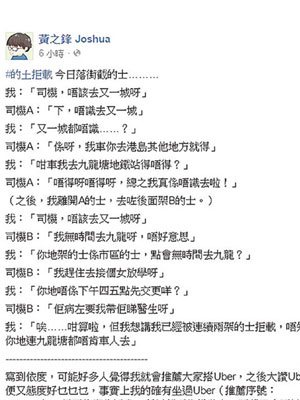
From Joshua Wong's Facebook:
Today I went out and tried to
hail a taxi driver:
Driver
A: "Eh, I don't know how to get to Festival Walk."
Me: "You don't even know how to get to Festival Walk? ..."
Driver A: "Yes, I can take you to anywhere on Hong Kong Island."
Me: "Can you take me to the Kowloon Tong MTR station?"
Driver A: "No, no, no. Anyway I really don't know how to get there!"
So I left Taxi A and then I tried the next
taxi.
Me: "Driver,
please go to Festival Walk."
Driver B: "I don't have time to to go Kowloon. I am sorry."
Me: "You taxi is a city taxi. How can you have no time to go to Kowloon?"
Driver B: "I am in a hurry to pick up my daughter after school."
Me: "Don't your shifts end around 4pm or 5pm?"
Driver B: "She is ill and I am taking her to visit a doctor."
Me: "(Sigh) ... Forget it ... But I want to say that I have been refused
by two taxi drivers in a row. Have you ever met a taxi driver who won't
even take you to Kowloon Tong?"
At this point, a lot of people may think
that I was going to recommend Uber to everyone and praise Uber for
convenience and good attitude. But I have really taken Uber ...
(HKG
Pao) September 1, 2015.
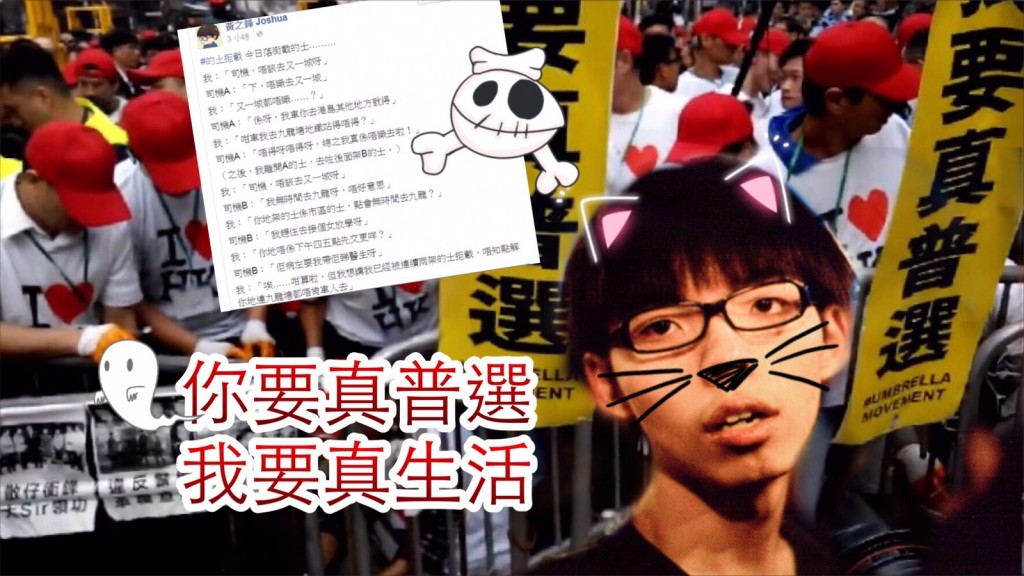
Little Red Riding Hood is the
nickname for the drivers of the red-top taxis in Hong Kong. During the Occupy
Central period, some of the taxi drivers came out to clear the barricades
themselves in order to protect their livelihood. After all, Occupy Central
impacted them directly. Those political ideas and demands were abstract and
remote, but their decreased daily incomes were immediately and painfully
obvious.
Joshua Wong's last name is Wong
which is a homonym for Yellow. Joshua Wong is the Yellow Rat Weasel. The Yellow
Rat Weasels refused to open the roads for Little Red Riding Hood. The Yellow Rat
Weasels also wanted to "break existing rules" and therefore they are the
principal supporters of Uber. Obviously, Little Red Riding Hood is not pleased
with the Yellow Rat Weasels.
The Yellow Rat Weasels demanded
that the police must protect all citizens equally. But Little Red Riding Hood is
not a public servant and therefore does not have to give a rat's ass. It was
very polite of Taxi Driver A to say that he didn't know how to go to Kowloon
Tong.
The real world is not an
electronic game where everything goes reset to normal when you quit. In the real
world, your actions have consequences which you must deal with sooner or later.
Internet comments:
- This is not the first time that
Joshua Wong has been treated brusquely by taxi driver.
(Ming
Pao) December 16, 2014
Scholarism convener Joshua Wong said on
a Commercial Radio programme yesterday that he once got on a taxi to go to
Admiralty. The driver probably didn't recognize him at first. But halfway
through the trip, the taxi driver stopped the car at an intersection and said:
"You get off!" Joshua Wong said: "Alright!" He explained that he did not bother
to ask for the reason. "He knew that I was Joshua Wong and he would only have
cursed me out!" He also explained that he has encountered other anti-Occupy taxi
drivers. They would drive up when they saw him waving for a taxi. But once they
saw who he was, they would speed off.
So why were these two
taxi drivers any different? What has this got to do with the superiority of Uber?
If Occupy Central were still going on, Uber drivers wouldn't treat him any
differently either because their livelihoods would be affected just as much.
- Joshua Wong also said that he wanted
all taxis to have GPS installed, so that they can't claim to not know the
way. LOL. You can have Google Map installed, but Google Map has no idea that
Occupy Central people have certain roads blocked. Furthermore, roads are
sometimes dynamically blocked with no warnings (as in punks tossing traffic
cones onto the roadway, or pretending to pick up coins). When your taxi gets
trapped, are you going to open the door and abandon the taxi, leaving the taxi
driver stuck? Or are you going to stay with the running meter? Answer that!
- The reason why Taxi Driver A didn't
know the way and Taxi Driver B wanted to pick up his ill daughter is that they
recognized Joshua Wong and didn't want him as their passenger.
- If you want to go quickly from Hong
Kong Island to Festival Walk (Kowloon Tong), you should note that the
cross-harbor tunnels are congested all the time. So it is quicker to use the
subway, as Festival Walk is right at the Kowloon Tong MTR station. Joshua Wong
can even take a snack
during the trip.
- Since Joshua Wong's group Scholarism is flushed with cash, he can afford to
take taxis instead of riding the subway where he has to mix with the hoi
polloi. If he rides the MTR, he may be mobbed by his many fans. After all,
Scholarism is
supported by 0.1% of the population.
- It is against the law for a taxi
driver to refuse a ride. Joshua Wong should have called the police immediately
... oh wait, he doesn't believe in rule-of-law and he breaks the law all the
time himself. It was certainly illegal to block the streets, especially for 79
days in a row. So never mind ...
- The taxi drivers broke the law, and therefore Joshua Wong was among kindred
spirits.
- As the Yellow Ribbons say, in matters of great right-vs-wrong, the law comes
second. So the law matters for naught. The only issue is whether the taxi drivers felt
righteous at the time that they kicked Joshua Wong out. They did. QED.
- The taxi drivers knowingly broke the law out of personal beliefs and they
accepted any consequences that may come out of the unjust legal system.
Therefore they were engaged in a courageous act of civil disobedience.
- It is against the law for a taxi
driver to refuse a ride. But if a skunk got into the taxi, must the taxi driver
take it to the destination?
- Wrong analogy. Joshua Wong is not a skunk. Joshua Wong is a Yellow Rat Weasel.
- Hey hey, Joshua Wong, this is the
Internet age. When you got assaulted in Ta Kok Tsui, your girlfriend's first
reaction was not to protect you but to take our her phone and start filming. In
like manner, your first reaction should have been to film the taxi driver's
license information. Afterwards, you don't even bother file a complaint through the official
channels. Instead, you post it on your Facebook page and call for an all-out
human flesh search to destroy the man, his company and his family. To the extent that you couldn't provide any further details,
it means that you were using the Apple Daily/Next Magazine journalistic style of
fiction-writing in order to score some points on the Uber issue.
- To make a fair-and-balanced full-length documentary, Joshua Wong should have summoned a Uber car
immediately and showed how wonderful the Uber service is.
- Even if Joshua Wong had the taxi driver information to call the police, he
couldn't because of the ignominy of "Calling the police Uncles when you need
them, calling them Dogs when they stand in your way."
- The whole point about Joshua Wong's
Facebook post is not about taking revenge against Taxi Drivers A and B. It is about
getting people to donate more money so that Joshua Wong can continue to ride
taxis whenever he can find drivers willing to take him.
Q1. The ratings of the 20
pan-democratic legislative councilors were as follows (from low to high):
39.9 Leung Kwok-hung (League of Social Democrats)
40.6 Raymond Wong Yuk-man
41.9 Chan Wai-yip (League of Social Democrats)
42.3 Chan Chi-chuen (People Power)
44.1 Albert Ho Chun-yan (Democratic Power)
44.5 Lee Cheuk-yan (Labour Party)
45.6 Claudia Mo Man-ching (Civic Party)
47.8 Cyd Ho Sau-lan (Labour Party)
48.3 Gary Fan Kwok-wai (Neo-democrats)
49.1 Alan Leong Kah-kit (Civic Party)
50.8 Emily Lau Wai-hing (Democratic Party)
50.9 Woo Chi-wai (Democratic Party)
52.0 Helen Wong Pik-wan (Democratic Party)
52.1 Sin Chung-kai (Democratic Party)
52.7 Leung Yiu-chung (Neighborhood Worker Service)
53.0 Kwok Ka-ki (Civic Party)
53.9 James To Kun-sun (Democratic Party)
54.1 Kenneth Chan Ka-lok (Civic Party)
55.0 Fernando Cheung Chiu-hung (Labour Party)
56.8 Frederick Fung Kin-kee (ADPL)
Q2. Top 10 Legislators in approve rates (with
Net approval rates = Approve - Disapprove)
63.1% (+43.5%) Frederick Fung Kin-kee (ADPL)
57.5% (+33.2%) James To Kun-sun (Democratic Party)
55.4% (+21.5%) Emily Lau Wah-hing (Democratic Party)
51.9% (+15.0%) Alan Leong Kah-kit (Civic Party)
49.1% (+29.9%) Sin Chung-kai (Democratic Party)
47.9% (+26.3%) Fernando Cheung Chiu-hung (Labour Party)
46.7% (+22.8%) Helen Wong Pik-wan (Democratic Party)
45.0% (+0.7%) Lee Cheuk-yan (Labour Party)
44.0% (+9.4%) Cyd Ho Sau-lan (Labour Party)
43.3% (-1.0%) Albert Ho Chun-yan
Q3. Top 10 Legislators in disapproval rates
(with Net Approval Rate = Approve - Disapprove)
51.9% (-12.2%) Raymond Wong Yuk-man
51.0% (-9.9%) Leung Kwok-hung (League of Social Democrats)
45.5% (-2.6%) Chan Wai-yip (League of Social Democrats)
44.3% (+0.7%) Lee Cheun-yan (Labour Party)
44.3% (-1.0%) Albert Ho Chun-yan (Democratic Party)
39.7% (-6.2%) Chan Chi-chuen (People Power)
38.7% (+0.3%) Claudia Mo Man-ching (Civic Party)
36.9% (+15%) Alan Leong Kah-kit (Civic Party)
34.6% (9.4%) Cyd Ho Saul-lan (Labour Party)
33.9% (+21.5%) Emily Lau Wai-hing (Democratic Party)
Q4. Pan-democratic non-legislators ranked by
disapproval rate (with Net Approval Rate = Approve - Disapprove)
46.5% (-10.2%) Joshua Wong Chi-fung (Scholarism)
46.2% (-17.0%) Jimmy Lai Chi-ying (Next Media)
44.2% (-10.7%) Benny Tai Yiu-ting (Hong Kong University)
41.3% (-4.9%) Joseph Zen (Catholic Church)
31.6% (+16.6%) Martin Lee Chu-ming (Democratic Party)
28.9% (+9.1%) Robert Chung Ting-yiu (Hong Kong University Public Opinion
Programme)
26.3% (+26.8%) Audrey Eu Yuet-mee (Civic Party)
Internet comments:
- How bad were they? There
happens to be a comparative norm -- against Chinese Communist Party
dictators who never got elected by popular mandate.
(Hong
Kong University Public Opinion Programme) 1,003 Hong Kong residents
were interviewed on August 14-20, 2015. The ratings for the recent Chinese
Communist leaders were:
63.9: Wen Jiabao
61.9: Xi Jinping
58.1: Li Keqiang
55.9: Hu Jintao
Q1. Do you agree that the Hong
Kong University Council has the ultimate authority to make the decision to
appoint the pro vice chancellor?
75%: Yes
11%: No
8%: Hard to say
6%: No opinion
Q2. If the
University Council ultimately rejects the recommendation by the selection
committee, do you think this decision violates the principle of
"self-determination and freedom" for the school?
30%: Yes
51%: No
11%: Hard to say
8%: No opinion
Q3. Do you
accept that a person with clear political positions becomes the pro vice
chancellor at a university?
21%: Accept
65%: Does not accept
9%: Hard to say
5%: No opinion
Q4. Do you
approve of the actions of the students and activists against the University
Council earlier?
17%: Approve
70%: Disapprove
8%: Hard to say
5%: No opinion
Q5. Do you
think those who attacked the University Council should be held accountable?
56%: Yes
24%: No
14%: Hard to say
6%: No opinion
(Hong
Kong Free Press) Occupy protesters get community service for smashing
LegCo door. July 14, 2015.
Protesters who
smashed into the Legislative Council building during last yearÆs
pro-democracy Occupy protests have each been sentenced to 150 hours of
community service.
The four
protesters û Cheng Yeung, Tai Chi-shing, Cheung Chi-pong and Shek Ka-fai,
aged between 18 and 24 û previously pleaded guilty to criminal damage and
unlawful assembly. On Monday, they agreed to serve the community service and
pay court costs of HK$500 each at the Eastern Magistrate Courts in Sai Wan
Ho.
Principal
magistrate Bina Chainrai refused the prosecutionÆs request that the accused
pay a total amount of almost HK$587,000 in reparations, saying that the
prosecutorÆs report failed to illustrate the value of the destroyed items.
She suggested the prosecutor commence civil proceedings instead if they wish
to receive compensation through the court.
The four were
among numerous protesters who gathered outside the legislature in November
in response to a false rumour that an ôInternet Article 23ö bill would be
passed that day. The rumoured ordinance proposed to regulate internet use in
the territory and potentially criminalise popular online parodies.
The incident
was also seen as an attempt to escalate the stagnant Occupy movement,
thereby applying more pressure upon the government. The move was met with
disapproval by the majority of protesters, earning condemnation
from pan-democrats and student groups.
Although Labour
Party vice-chairman Fernando Cheung Chiu-hung attempted to persuade
protesters to leave the scene, he was dismissed immediately. The accused
used metal barriers and bricks to break the buildingÆs glass doors, making
way for dozens of protesters to enter the LegCo complex.
The event was a turning point
for the pro-democracy movement, precipitating a split between mainstream
pan-democrats and those pressing for more forceful forms of protest.
(Oriental
Daily) July 14, 2015.
The prosecution requested the
court to make the defendants pay more than $580,000 in reparations for
property damage. The defendants claimed through their lawyers that they are
unable to pay the amount, because they work only as salesman, kitchen
workers and accounting clerks with just over $10,000 in month income. The
magistrate said that the amount exceeded the $100,000 maximum for the lower
court and suggested that the prosecutor should commence civil proceedings to recover the cost.
(Wen
Wei Po) August 19, 2015.
At court yesterday, the
prosecution pointed out that the sentence of community service does not
accurately reflect the seriousness of the nearly riotous activity.
Therefore, the prosecution is appealing to replace community service by jail
term. At court yesterday, the prosecution showed the news video for the
first time. It can be seen that defendants Cheng and Tai held up the iron
barrier and ram it against the glass door. Cheung used a metal rod to bash
the glass door. Shek kicked the glass door with his foot.
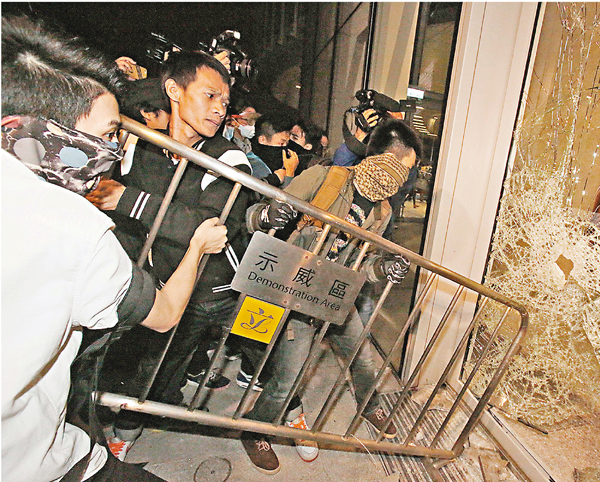
The defense said that the
reporters were in proximity to the defendants and they did not exhibit any
fear. Therefore, the case must surely not be as serious as the prosecution
asserts. After all, nobody got hurt. The magistrate asked: "Is a picture
worth more than a thousand words?"
The defense lawyer for defendant
Cheng said that his client quit his job in order to participate in Occupy
Central, spent a whole month sleeping in the street and got emotionally
upset, but this shows that he is a young man who cares about society. The
defense lawyer also said that the defendants did not enter the building
after they broke though, so this proves that they merely wanted to express
their discontent and they had no intention of entering/occupying the
building. Furthermore, the defendants acted because of some incorrect
information about Internet Article 23, and therefore they were victims
themselves.
The four defendants were charged
with participating in an illegal assembly at the Legislative Council
building on November 19, 2014. They were also charged with destroying 9
glass doors, 7 glass walls, the ceiling and 25 manhole covers costing
$587,000 to repair/replace.
(SCMP)
Hong Kong protesters handed jail time for using metal barrier to charge doors
of Legco building. August 26, 2015.
Three protesters previously sentenced to
community service for breaking doors at the Legislative Council building
during a rally last year had their sentences changed to 3 ¢ months in jail
on Tuesday after a magistrate reconsidered the violent nature of their
actions.
Tai Chi-shing, 24, Cheung Chi-pong, 23, and
Shek Ka-fai, 24, were jailed by Principal Magistrate Bina Chainrai at
Eastern Court. They were released on bail, pending an appeal.
Their co-accused, Cheng Yeung, 19, was
remanded in custody, pending a series of reports for sentencing on September
8.
In July, the four were ordered to perform
150 hours of community service, but the Department of Justice has since
conducted a review of their punishments.
Chainrai said she considered the
non-custodial sentence inappropriate after hearing submissions from the
prosecution and given ôthe level of violence, the number of people involved,
the extensive damage caused as well as the intimidating nature of the
gathering giving rise to reasonable fear among bystandersö.
The four had pleaded guilty to one count of
unlawful assembly and another of criminal damage in using a metal barrier to
charge at the Legco building in Admiralty on November 19 last year.
At a hearing earlier this month to review
the sentences, the prosecution played video exhibits to the court showing
how Tai and Cheung charged the glass doors of the building several times
while holding the steel barriers during that nightÆs protest against
proposed amendments to the Copyright Ordinance.
Shek was seen prodding the doors with a
metal pole, while Cheng was captured banging a door once with a metal
barrier.
On Tuesday, barrister Johnny So Chun-man,
for Cheng and Cheung, said in mitigation submissions that the rally was an
ôextension of the Occupy movementö last year and that the two were emotional
and made a bad decision.
(Hong
Kong Free Press) Occupy protesters who smashed door at legislature get
jail time after Dept. of Justice appeal. August 25, 2015.
Protesters who smashed a door at the Hong
Kong legislature during last yearÆs pro-democracy Occupy protests will now
face three-and-a-half months imprisonment instead of 150 hours community
service following an appeal by the Department of Justice. The DoJ argued
that the original sentence was not heavy enough.
The four defendants, who were charged with
criminal damage and taking part in an unlawful assembly, appeared at Eastern
MagistratesÆ Court on Tuesday morning.
Three were given jail time and
released on bail, though their lawyers have said they will appeal the
sentence. The fourth defendantÆs case has been adjourned to next month in
anticipation of a report from the detention centre, as he was only 19 years
old at the time of the incident, local media reported.
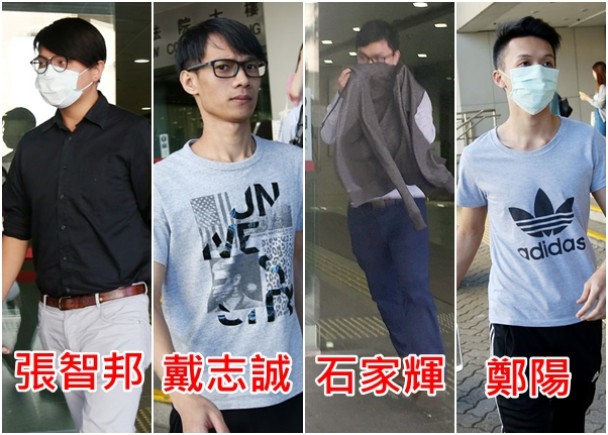
(Oriental
Daily) September 8, 2015.
The 150-hour community service sentence for
19-year-old Cheng Yeung was upheld. The defense pointed out that Cheng was
influenced by the crowd and committed the crime in a moment of rashness.
Afterwards, he regrets his action. So far, he has completed 40 hours of
community service. His 11-year-old sister wrote a letter of petition, and
his grandparents both said that he was a good grandson. The magistrate
decided to give the young defendant a chance and upheld the original
sentence.
(The
Standard) February 25, 2016.
Three young protesters lost appeals against convictions for
unlawful assembly, criminal damage and assaulting a police officer during
the 2014 Occupy movement and were imprisoned immediately.
Four of a group of protesters who stormed the legislative
building at Tamar using metal barriers as rams following rumors the
Copyright (Amendment) Bill was to be discussed on November 19, 2014, had
pleaded guilty before a magistrate to charges and were sentenced to
community service in July.
Authorities thought the punishment too light and the
Department of Justice asked for a review of the sentences.
In September, the court upheld the community service order
with regard to the youngest of the four, 19-year-old Cheng Yeung, but
sentenced the others to 3 months' imprisonment.
Tai Chi-shing and Shek Ka-fai, both 24, appealed against
their sentences but were rejected and ordered to serve their sentences
immediately. Third defendant Cheung Chi-pong, 23, gave up his appeal. In
appealing, Tai and Shek said the storming incident was not rioting and that
sentences for the four should be the same.
But High Court judge Judianna Wai Ling Barnes said yesterday
that the number of participants, the degree of violence and threat of the
clashes were comparable to a riot and the magistrate did not err in
sentencing.
(Wen
Wei Po) February 16, 2017.
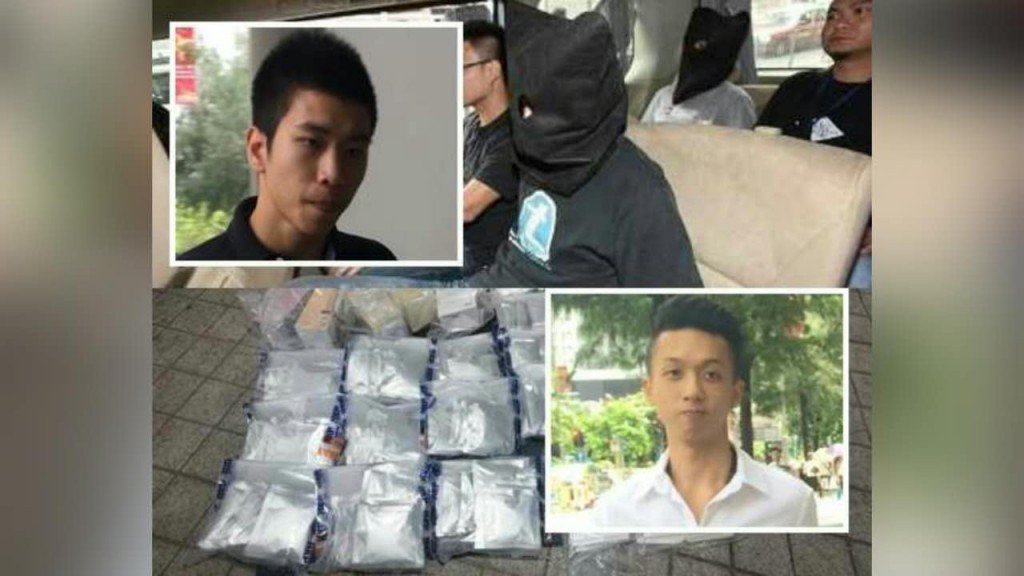
In the early morning of May 13, 2016,
unemployed Yuan Tsz-fung and interior decoration worker Cheung Yeung came
out of City Garden Hotel, North Point and put their backpacks and plastic
bags onto a vehicle. Police officers approached to check them, and found
that the backpack contained more than 10 boxes of My Beautiful Diary sheet
masks which contained drugs, plus packaging equipment, aluminum bags,
sealing machine, etc. In total there were 3.51 kilograms of the drug known
as 'ice' (crystal methamphetamine) worth more than $1 million on the
streets.
According to the court records, these two
individuals took part in the clash at the Legislative Council in November
2014. 18-year-old Yuan was found guilty of hitting a police officer on the
upper lip and sentenced to a probation order. 18-year-old Cheng was found
guilty of illegal assembly and criminal destruction of property and
sentenced to a 150-hour community service order.
Yuan's mother wrote a letter to say that
because she and her husband had bad relations, their son wandered around the
streets and hung around people who were bad influence.
Cheng said that he had no idea that Yuan was
dealing with drugs when he booked the hotel room. When he found out that
drugs were present, he wanted to leave immediately. But Yuan persuaded him
to stay and help with packaging and transporting. Therefore, the judge
should give him a shorter sentence.
Yesterday, Yuan and Cheng pleaded guilty to
drug sales. Yuan was sentenced 16 years 8 months in jail, and Cheng was
sentenced to 17 years in jail.
Videos of the incident:
Internet
comments:
-
Schadenfreude!
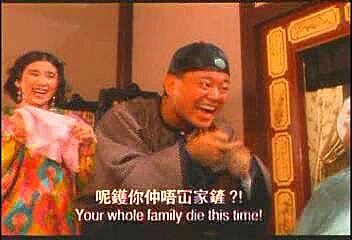
- I was
eating at a restaurant when the on-site television set aired this piece of
good news. A number of customers spontaneously applauded. We haven't
forgiven the Yellow Ribbons yet for what they did to us!
- That
150 hours of community service was absurd. Do you remember the civil servant
who had to serve 200 hours of community service because he used a fake
doctor's note to take four sick days off. Take a look at these photos. Which
is worse?
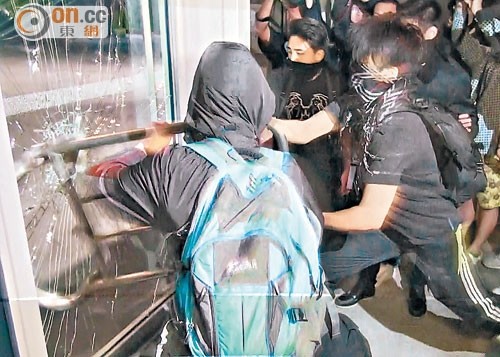
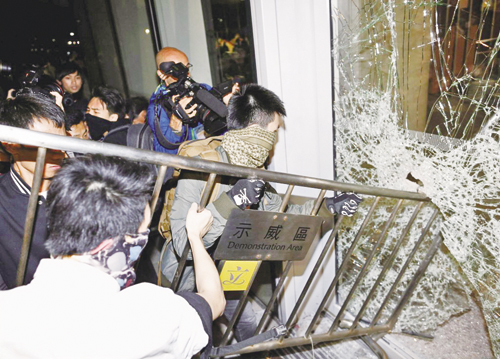
- This
was civil disobedience. Benny Tai said so. Civil disobedience should never
be punished, especially since they are fighting for genuine universal
suffrage on behalf of the people of Hong Kong.
- I am a teacher and I couldn't go to Occupy Central every day because of my
job. But those who engaged in civil disobedience have earned my respect,
especially the young people who are the future pillars of society.
- Fuck! If these people are the pillars of society, then Hong Kong will sink
into the mud! And another big Fuck You! for being all talk and no action.
- So what if a window or two got broken? More windows are broken each time
that a typhoon hits Hong Kong.
- Those four young men tried to defend themselves with the iron barriers,
which hit the glass door by accident. Community service was the appropriate
punishment.
- Smashing the glass door is no different from
Raymond Wong Yuk-man throwing a glass
of water at Chief Executive CY Leung. Nobody got hurt. In American football,
the saying goes: No harm, no foul. The
four defendants should be released immediately just as Raymond Wong Yuk-man
should be. That is, if rule-of-law prevails.
- Apart from anything else, Raymond Wong smashed one glass whereas these
four guys caused $587,000 in damages. And that magistrate won't even make
them pay for it! Instead, the magistrate recommended the prosecutor to
pursue a civil case!
- If I come to your house and cause $587,000 in damages, is that okay with
you as long as I didn't hurt you?
- The relevant statute is:
Cap 200 s 60 Destroying or damaging property. The relevant
punishment of offences is
Cap 200 s63:
(1) A person guilty of arson under
section 60 or of an offence under section 60(2) (whether arson or not)
shall be liable on conviction upon indictment to imprisonment for life.
(2) A person guilty of any other offence under this Part shall be liable
on conviction upon indictment to imprisonment for 10 years.
If creating $587,000 in property damages
brings only 3-1/2 months of jail, then you need to create at least $587,000
x 120 / 3.5 = $20,125,714 in property damages to earn the maximum of 10
years (=120 months) in jail. Just thought that you might want to know.
- On the first day of Occupy Central,
legislator Lee Cheuk-yan said that if you get arrested by the police, you
should shout out your name and Hong Kong ID number and then hundreds of
lawyers will come out to represent you. I wonder how many lawyers are
representing these four defendants. This is relevant because the four have
been disowned by both the pan-democratic politicians as well as the students
for their violent behavior.
- There was a reason why the sentence was
3-1/2 months of jail and not less. See
Wikipedia on Criminal Records in Hong Kong.
Criminal records are not purged
regardless of time or seriousness of the case.
However, under the Rehabilitation of
Offenders Ordinance (HK Laws. Chap 297), a criminal record is considered
'spent' if it was the first criminal offence, sentenced to less than 3
months in jail or fined less than $10,000 and a period of 3 years has
elapsed since conviction and no new conviction is registered against the
said person.
Spent records are recorded as such with
the exception to:
- Attempting to be licensed as a
barrister, solicitor, accountant or insurance broker
- Applying to become a trustee or
controller for Mandatory Provident Fund or a bank controller, executive
or employee
- Disciplinary proceedings against any
judicial officer, members of disciplined services, probation officer,
employees of Hong Kong Monetary Authority, Mandatory Provident Fund
Schemes Authority, Office of the Commissioner of Insurance (insurance
officers) and Securities and Futures Commission (executive grade only)
- Disciplinary proceedings against
government officials who are paid on any Directorate or Directorate
(Judicial/Legal Group) Pay Scale and those above point 27 on the Master
Pay Scale.
All Hong Kong residents who plan to adopt
children or travel/emigrate to another country can request for a
Certificate of No Criminal Conviction - a document that is issued directly
to the Consulate and/or government agencies and not to the requester.
Spent records do appear on such certificates with annotations that such
records are spent according to Hong Kong law.
- I read
the fine print. The magistrate sentenced the three to 3-1/2 months in jail.
However, since the defendants had already completed 24 hours out of their
150 community service hours, the magistrate reduced their jail time by 1/3.
This magistrate badly needs a calculator, because 24/150 = 16% and not 33%.
- Since
these defendants don't have money, they will get legal aid for their appeal.
So it's a lot cheaper to just let them go.
- These
defendants used a victimization strategy -- they said that they were
misinformed by other individuals and therefore they are victims too. The
same strategy can be adapted for all those who were charged with unlawful
assembly during Occupy Central -- to wit, Professor Benny Tai told us that
Occupy Central was a righteous act of civil disobedience for which there are
no legal consequences. We believed him and therefore we are victims too.
- Why did
one magistrate impose community service at the initial trial, but another
magistrate imposed jail sentences upon appeal? The difference was that the
prosecution presented the news video of the event this time.
I suspect that the first magistrate was being very rash. Perhaps the
prosecution offered to show her the tapes, but she said not to waste her
time. She
"refused the prosecutionÆs request that the accused pay a total amount of
almost HK$587,000 in reparations, saying that the prosecutorÆs report failed
to illustrate the value of the destroyed items." Perhaps the prosecution
offered to provide with the details, but she said not to waste her time.
- The above scenario is totally wrong. The defendants pleaded guilty directly
in the initial trial so
that no evidence was presented to the magistrate. Based upon the fact that
the defendants had no prior records, seemed to be gainfully employed, entered a
guilty plea without contest, avoided the expense of holding the trial and
promised not to ever do this again, the magistrate imposed the lenient
sentences. This was good strategizing by the defense lawyers. However, the
prosecutor appealed the sentences and presented the videos to the same
magistrate for the first time. Everything changed, for this was not the
run-of-the-mill sit-down love-in by the side of the road. This society would break
down if such activities become normalized. Even if the magistrate had
personally seen the news reports at the time, they are not admissible
evidence for the case and she must exclude them from her considerations. But
she is allowed to consider the evidence after the prosecution introduced it
during the appeal hearing.
- Interesting. The magistrate said that the normal sentence for criminal
destruction of property was 3 months, but she reduced it to 1-1/2 months due
to mitigating circumstances. The normal sentence for illegal assembly was 6
months, but she reduced it to 3-1/2 months due to mitigating circumstances.
The two sentences were to be served concurrently and that was why the total
jail term was 3-1/2 months. So remember this: the starting point for illegal
assembly is 6 months. Are you listening ... Joshua Wong, Alex Chow, Nathan
Law, etc?
- The
case of the attack on former Ming Pao chief editor Kevin Lau ended with the
two attackers being sentenced to 19-year jail terms (see
EJinsight). The outcome was unsatisfactory because we still
don't know who paid these two men to do it. And what was the reason?
In like manner, the jail sentences for the four defendants may be satisfying
in themselves, but we still don't know who manufactured the rumor that the
Legislative Council would be holding a hearing the next day on the
non-existent Internet
Article 23. And why?
- At the time, one theory was that there were policemen pretending to be
demonstrators and egging others (including the four defendants) on (ref: a
self-proclaimed eyewitness at the scene:
Commercial Radio HK, or Lee Wai-ling at
Apple
Daily). Of course, it is always somebody else's fault and you don't
know enough to tell right from wrong.
- The
defendants want to appeal the sentence. There have been previous cases in
which an appeal led to a heavier sentence, because the defendant clearly
showed no remorse and insisted on wasting the court's time.
- There
are more than 600 comments in this tread already. The comments are almost
completely one-sided, except for that one troll who is trying to be
difficult. However, you shouldn't expect Apple Daily to report this type of
reaction (even
though their news gathering activities are now almost completely based upon
the Internet).
- Look
what happened. The Yellow Ribbon judge let these guys off with probation
order/community service. Then they come back hauling 3.5 kilograms of
crystal
methamphetamine ('ice').
By giving a 12-month probation order to hitting a policeman on the upper
lip, they think that crime pays.
(SCMP)
Former inmate challenges policy over Chinese and Western meals in Hong Kong
prisons. August 19, 2015.
A protester who was jailed for throwing an
egg at Financial Secretary John Tsang Chun-wah has accused the Correctional
Services Department of racial discrimination for serving him smaller
Chinese-style meals instead of larger Western portions.
League of Social DemocratsÆ secretary
general Derek Chan Tak-cheung, who was jailed for three weeks, claimed in a
High Court document that the arrangement was unlawful and unconstitutional.
Chan said he was detained at Lai Chi Kok
Reception Centre between April 29 and May 2, and at Tong Fuk Correctional
Institution from May 2 to 19. But he soon noticed that the diet provided to
Chinese prisoners was different from what was given to Western inmates.
He said that the Chinese breakfast included
rice with a little meat, while the Western meal had cheese, jam, butter,
toast and milk tea. The Chinese lunch was congee with beans, Chinese tea and
a piece of bread, while the Western one consisted of a hamburger,
vegetables, a boiled egg, toast, potatoes and milk tea. For dinner, the
Chinese meal options were vegetables and meat, fried fish with bones or
chicken wings, while the Western options included a hamburger, pork,
boneless fried fish steak, fried chicken wings, potatoes, baked beans in
tomato sauce, bread, butter and jam, and milk tea. ôSometimes the Western
diet would provide deep-fried chicken wings, which were not available in the
Chinese diet. The portion for the Western diet was also larger,ö Chan wrote
in the document.
He observed that officers classified
prisoners by their skin colour. Those with ôyellow skinö would be given
Chinese meals, while those with ôblack or white skinö would receive
Western-style food.
Chan tested the arrangement on his last day
in prison by asking for a Western meal, but he was refused.
ôFor the avoidance of doubt, both the
Chinese diet and the Western diet are normal prison diets, and [Chan] was
not asking for a diet that differs from the normal prison diet,ö the
document stated.
Chan claimed that he understood and
believed this was the departmentÆs practice. However, he found this
arrangement breached the Race Discrimination Ordinance and Article 25 of the
Basic Law, which states that all Hong Kong residents shall be equal before
the law. He asked the court to review the departmentÆs arrangement.
Meanwhile, the department said its prison
meals were in line with all legal requirements for providing ôsimple and
wholesomeö food to inmates. Weight and nutritional value of meals were
approved by accredited dietitians, the Department of Health and in
accordance with international health guidelines.
All newly-housed inmates are assigned
rice-based staple meals, known as the ôdietary scale oneö. Inmates can then
apply to change to other food categories, according to their health, dietary
or religious needs.
If there are ôappropriate reasonsö, the
department will help them change their meal plan û dietary scale two
includes curry and chapati as staple food; dietary scale three includes
potatoes and bread as staple food; and dietary scale four comprises a vegan
meal. The CSD has a total of 29 types of meal available, according to a
spokesman.
(EJinsight)
Activist files lawsuit against æmeal discriminationÆ in HK jails. August 18,
2015.
Why is it that Western inmates are given
better food than their local and Asian counterparts in Hong Kong prisons?
This is the gist of a petition for judicial review that a pro-democracy
activist filed with the High Court on Tuesday.
In the petition, Derek Chan Tak-cheung,
secretary general of the League of Social Democrats, complained that Chinese
and other Asian prisoners are not allowed to take Western meals, which he
said could be a form of racial discrimination and a violation of Article 25
of the Basic Law.
He said the servings and contents of
Western and Chinese meals are considerably different.
For instance, Western lunch is much richer,
consisting of a hamburger, vegetables, eggs, potatoes and milk tea. On the
other hand, a Chinese lunch only comprises congee, tea and a slice of bread.
Chan said the assignment of what kind of
meals an inmate gets is done according to the prisonerÆs skin color. Based
on his experience in prison, he said, those with ôyellow skinö are given
Chinese meals while Caucasians and black people get Western meals. At
present, Asians and other foreigners are separated while dining.
Chan called for the removal of the policy
as it is discriminatory.
Chan served a three-week jail sentence in
late April and May in Tong Fok prison after he was found guilty of common
assault for throwing eggs at Financial Secretary John Tsang Chun-wah during
a public forum in December 2013.
(Coconuts
Hong Kong) Egg-throwing inmate complains of racist Hong Kong prison
food. August 20, 2015.
An activist who was jailed for three weeks
for throwing an egg at Financial Secretary John Tsang has complained that
the meal allocation system in prison is racist. Derek Chan of the League of
Social Democrats said he was served smaller Chinese-style meals instead of
hearty Western portions just because of the colour of his skin.
He was detained at Lai Chi Kok Reception
Centre between April 29 and May 2, and at Tong Fuk Correctional Institution
from May 2 to 19, according to the SCMP.
In an official document submitted to the
High Court, Chan said the meal system was unconstitutional and unlawful. He
claimed ôyellow"-skinned inmates received rice and meat for breakfast,
compared to cheese, jam, butter, toast and milk tea for ôwhite or blackö
inmates.
For lunch he was served congee and beans,
Chinese tea and bread, while the foreigners got a hamburger, veggies, a
boiled egg, toast, potatoes and milk tea. For dinner, Chan says he got
vegetables and meat, chicken wings and fried fish with bones.
The Westerners, however, got a boneless
fried fish steak, pork, chicken wings, (another) hamburger (more) potatoes,
baked beans(!), bread, butter, jam, and milk tea.
Jeez. WeÆre pretty sure the Western diet
was designed by an American. No offence, fatties.
ôSometimes the Western diet would provide
deep-fried chicken wings, which were not available in the Chinese diet. The
portion for the Western diet was also larger,ö Chan wrote in his complaint.
However, the Correctional Services
Department has responded by saying all prison meals have been approved by
dieticians and are in line with the requirement to provide ôsimple and
wholesomeö food to inmates. They also said inmates can change to a choice of
29 meal types if they apply through the proper channels.
WhoÆs betting juice cleanse and paleo are
on that list somewhere?
(SCMP)
A continental breakfast behind bars in Hong Kong jails. August 20, 2015.
The League of Social Democrats (LSD) is
fighting hard for gender and racial equalities - in our jails.
Last year, LSD co-founder and lawmaker
"Long Hair" Leung Kwok-hung sued the Correctional Services Department for
making him cut his signature locks. His argument was that women prisoners
could keep their hair long, so why couldn't he?
Hummm, it sounds like vexatious litigation
to me.
But his LSD sidekick Derek Chan Tak-cheung
may have a better argument about racial discrimination in terms of the
different food being served to prisoners based on their race.
Chan has just been released after serving
three weeks in jail for throwing an egg at the financial secretary. In
prison, he found that ethnic Chinese are served Chinese food, in smaller
portions and with fewer varieties than Western meals given to non-Chinese.
He has launched a case against the department at the High Court, arguing the
practice of serving different meals to different prisoners on the basis of
their race is unlawful and unconstitutional.
According to Chan, the Chinese breakfast
includes rice with a little meat, while the Western meal has cheese, jam,
butter, toast and milk tea. The Chinese lunch offers congee with beans,
Chinese tea and a piece of bread, while the Western one consists of a
hamburger, vegetables, a boiled egg, toast, potatoes and milk tea.
For dinner, the Chinese meal options are
vegetables and meat, fried fish with bones or chicken wings, while the
Western options include a hamburger, pork, boneless fried fish steak, fried
chicken wings, potatoes, baked beans in tomato sauce, bread, butter and jam,
and milk tea.
I don't know about you but the Western
meals sound definitely tastier, especially the breakfast, which is like a
continental breakfast served at hotels. The only things missing are a
croissant and a scone.
Chan argues the different meals served
amount to a breach of the race discrimination law and the Basic Law.
Instead of fighting Chan and his lawyers in
court, the department should really review its food policy. Here's an easy
way to make everyone happy at very little cost. Give every prisoner a choice
between having a Chinese and a Western meal.
Internet comments:
- Of course, the newspapers will report
only on what Derek Chan has to say, as in SCMP:
He [Derek Chan] said that the Chinese
breakfast included rice with a little meat, while the Western meal had
cheese, jam, butter, toast and milk tea. The Chinese lunch was congee with
beans, Chinese tea and a piece of bread, while the Western one consisted
of a hamburger, vegetables, a boiled egg, toast, potatoes and milk tea.
For dinner, the Chinese meal options were vegetables and meat, fried fish
with bones or chicken wings, while the Western options included a
hamburger, pork, boneless fried fish steak, fried chicken wings, potatoes,
baked beans in tomato sauce, bread, butter and jam, and milk tea.
ôSometimes the Western diet would provide deep-fried chicken wings, which
were not available in the Chinese diet. The portion for the Western diet
was also larger,ö Chan wrote in the document.
What is the reality? Well, you have to see the photos
for yourselves and decide whether the western meals (Type III) are
tastier than Chinese meals (Type I).
(Oriental
Daily) August 18, 2015.
The Correctional Services Department
said that there are four types of meals for the prisoners. New prisoners
are typically assigned to Type I rice-based staple meals (see top left
photo). Prisoners can apply to switch their diets. Type II meals include
curry and chapati as staple food (see top right photo). Type III meals
include potatoes and beans as staple food (see bottom left photo). Type
IV meals are vegetarian (see bottom right photo).
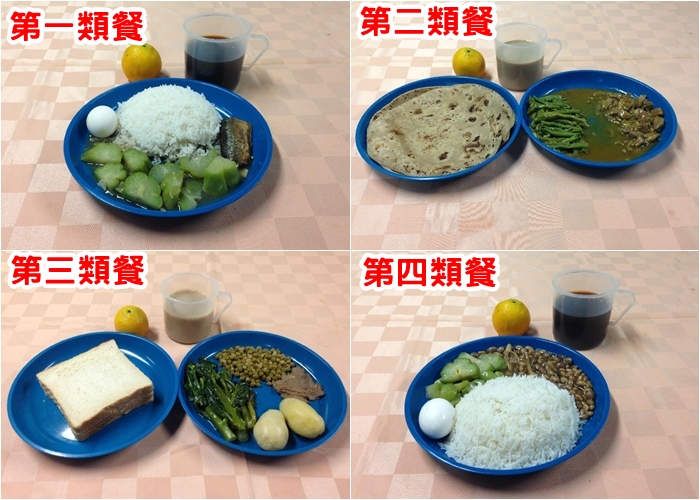
(Daily
Mail) Inside the Hong Kong hellhole where 'psycho banker' is held.
November 5, 2014.
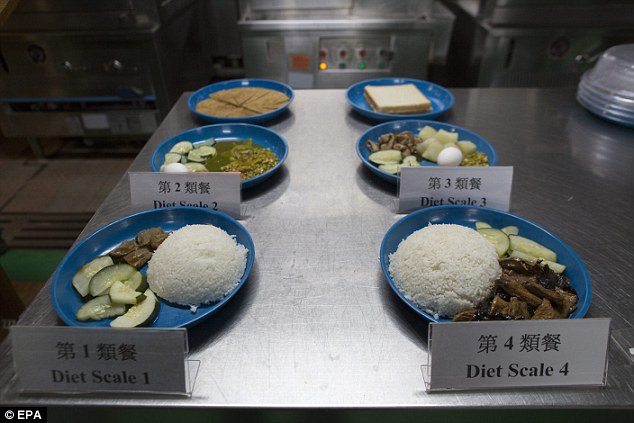
For God's sake, this is just prison
food, which is
cruel and unusual by definition. This is part and parcel of your
punishment! Stop fretting about not getting Michelin-starred food!
- If the League of Social Democrats don't
like CY Leung to be in charge of their prison meals, they could demand to
sub-contract food services to the Japanese.
- (Daily
Mail) As a prisoner of war camp it became notorious as a place of
torture and execution, with Mateen Ahmed Ansari - an Indian army captain -
posthumously awarded the George Cross after being beaten, starved and
eventually executed by Japanese troops who unsuccessfully demanded that he
renounce his allegiance to the British army and sow seeds of discontent
among his comrades. Nearly 600 prisoners of war and civilians killed by
the Japanese during the occupation are buried in the nearby Stanley War
Cemetery.
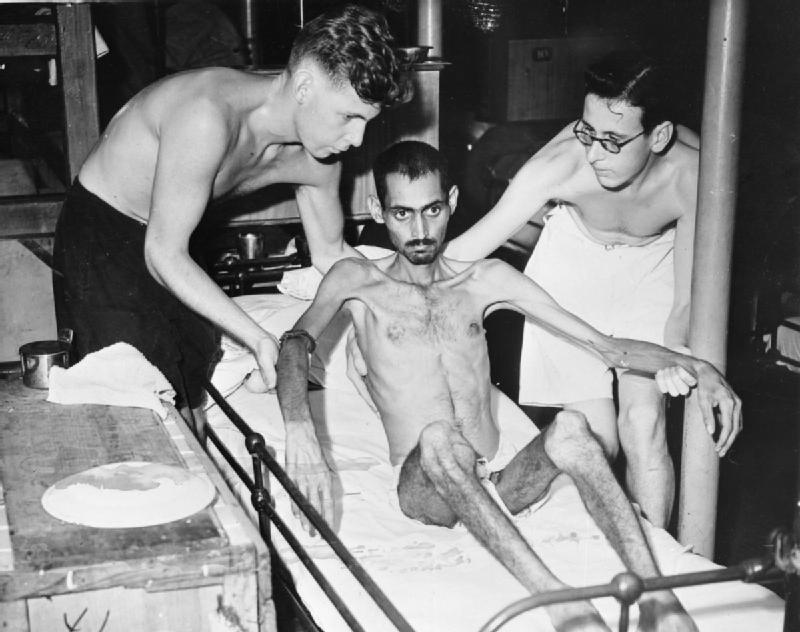
- On the last day of his jail sentence,
Derek Chan demanded to have a western meal instead of the usual Chinese
meal. He was turned down. The rejection has a simple explanation in terms of
logistics.
The Tong Fuk Prison has capacity for 925
prisoners. When new prisoners enter, they declare their meal preferences.
Each day, the meals are prepared in accordance with the stated preferences.
For example, there might be 800 Type I meals, 10 Type II meals, 90 Type III
meals and 25 Type IV meals. The prison does not fill Ó la carte
orders. That is, you cannot expect to wake up in the morning and decide that
you shall have hamburger at the spur of the moment.
If Ó la carte orders become the
order of the day, then the staff should prepare 925 Type I meals, 925 Type
II meals, 925 Types III meals and 925 Type IV meals so that each inmate can
make their choice on the spur of the moment. In the end, 925
assorted meals will be consumed and the remaining 2,775 meals taken to the
landfill. This is called being wasteful.
If Derek Chan wants to have western meals,
he can make an application through the appropriate channels. He can even
switch from Chinese to western meals with sufficient notice. To make an
unexpected demand on the last day of his jail term is just grandstanding.
(The
Standard) Golf club protesters take a swing at rich. August 17, 2015.
Around 20 protesters
barged into the Hong Kong Golf Club in Fan Ling yesterday, demanding that
the government take back the land to build public homes. The protesters held
up placards that read: "Reclaim golf land, build affordable housing" and
"Return my right to live, return land justice." They also carried banners
that read: "The powerful have land to play ball, while the poor have no land
to settle."
Among the nine groups involved in the
protest were the Land Justice League, Grassroots Housing, and Kwu Tung North
Development Concern Group. There were also groups representing residents in
subdivided flats.
The protesters said Hong Kong faces a stark
housing supply problem, with more than 100,000 residents living in
subdivided flats while 280,000 families are on the waiting list for public
housing.
"[Chief Executive] Leung Chun- ying on the
one hand asks where is the land, and on the other sells a hectare of
farmland in the golf course to Henderson Land Development for building high-
density luxury flats," the groups said. "Leung claims he will build new
towns for everyone to solve the problem of high rents and long waiting times
for public housing, yet he bends to the powerful and the rich, and places
the residents who lost their homes in the northeastern New Territories on
the opposing side against grassroots residents in urban areas to divide and
smear the weak."
Instead of driving residents and villagers
away from the northeastern New Territories, the protesters argued that the
government should take back "73 pieces of land" that are currently used for
private clubs as these only serve the rich and powerful. They demanded the
golf club land be reclaimed for public housing and called for a complete
review of all lands that involve private recreational leases.
League of Social Democrats vice chairman
Raphael Wong Ho-ming said: "You drive people away from occupied land, but
keep the vacant ones. How ridiculous." Another protester said the golf
course is the "size of Tsuen Wan where 100,000 units for the grassroots
could be built." They also demanded an end to the northeastern New
Territories development project.
Security guards earlier tried but failed to
block the protesters.
Some 9,900 public homes were built last
year, about 20 percent lower than the targeted 12,700.
Video:
- (Cable
TV) News coverage of the dozen or so demonstrators who charged into
the Fan Ling Golf Course.
- (Ming
Pao) News coverage
With respect to slogans such as "Reclaim golf
land, build affordable housing", "Return my right to live, return land
justice" and "The powerful have land to play ball, while the poor have no land
to settle", the case should not be limited solely to the Hong Kong Golf Club in
Fan Ling. There are a number of other clubs in similar situations (that is,
with unreasonably low land lease arrangements). When you selectively designate one
club for reclamation while leaving the others alone, that would be the rule of
man. The law needs to be uniformly applied to all applicable cases. The
following articles give the details for some of the clubs that fall into this
situation.
Definitions:
Rule of law:
Rule of law is the legal
principle that law should govern a nation, as opposed to being governed by
arbitrary decisions of individual government officials. It primarily
refers to the influence and authority of lawwithin society, particularly
as a constraint upon behavior, including behavior of government officials.
Rule of law implies that every citizen is
subject to the law, including law makers themselves. In this sense, it
stands in contrast to an autocracy, collective leadership, dictatorship,
or oligarchy where the rulers are held above the law. Lack of the rule of
law can be found in both democracies and dictatorships, for example
because of neglect or ignorance of the law.
Rule of man:
Rule of man is absence of rule of law. It
is a society in which one person, or a group of persons, rules
arbitrarily. The Sovereign exercises absolute authority and is not bound
by any law, he as a person stands outside law. The philosopher Thomas
Hobbes advocated such a society, saying that a society would be better if
it had one absolute monarch as he would be free to choose and do what he
thinks is best for the society without taking into account the opinions of
others.
Others dissent by historical evidence
that points in the opposing direction claiming the impermanence of the
systems brought on by dictators like Joseph Stalin, Adolf Hitler and Mao
Zedong which are remembered in having fared more by despotism than
government system and thereby typifying the exertion of "rule of man"
within their reigns. The results of which comprised violations to
internationally recognized basic human rights. Relating the common
inference of warning against the utility of such regimes that many have
cited within the adage that Power corrupts and absolute power corrupts
absolutely.
History:
(SCMP)
Hong Kong Club hits HK$60m rental gold. May 30, 2010.
Within the exclusive portals of Hong
Kong's poshest private club, the future looks rosy. Having resumed full
ownership of its premises in Central in the middle of last year, the Hong
Kong Club is looking forward to rental income of at least HK$60 million
from this financial year on. Even better, it pays government land rent of
just HK$324 a year, thanks to a 999-year lease inked in February 1895,
after the club was formed by eight taipans in 1846.
A few blocks away in Harcourt Road, Wan
Chai, the Hong Kong Red Cross pays HK$1,370 for its Anne Black
headquarters, while the Chinese Anglican Church is charged HK$1,000 for
its St James' Settlement Multi-Service Community Centre in Stone Nullah
Lane.
Many of the tycoons who enjoy the Hong
Kong Club's exclusive facilities would probably welcome such a deal for
their own businesses. In addition, the club paid no premium for the land
from which it will now reap tens of millions of dollars a year.
Under a 1983 deal, Hong Kong Land
redeveloped the prime site next to Statue Square and opposite the
Legislative Council building into a 24-floor tower. It took rental income
for 25 years from all but four podium floors reserved by the club for
bars, restaurants, a fitness centre with two squash courts, a billiard
room and four bowling alleys. The club also took a small portion of rental
income from the higher floors.
Since the arrangement ended last year the
club has signed several new tenancy agreements with regional and Wall
Street investment bankers such as Davis Polk, which moved into room 1904
for HK$185,570 a month, and Somerley, which took up the 10th floor for
three years to September 2012 for HK$590,784 a month. 'The budgeted rental
for [2009] is HK$61.9 million, up from HK$28.2 million in 2008,' the club
wrote in its latest annual report.
Publicly, it has nothing further to say
about its low land rent and rising rental income. Responding to inquiries
it said: 'As we are a private club, we thus have no comment on the
subject.'
The redevelopment plans took shape while
Hong Kong's future was being negotiated between premier Zhao Ziyang and
British prime minister Margaret Thatcher.
There was intense debate in the club and
among the public about whether the old building should be torn down.
Preservationists led by the Heritage Society proposed saving the
80-year-old Victorian structure, while the club management expressed
concerns about potential fire and structural hazards in the largely-timber
building. It prevailed.
The club's membership list, which reads
like a Who's Who of the city's business elite, includes 1,400 resident
members and about 2,500 absent members. The current chairman is Swire
Properties chief executive Martin Cubbon with Wing On International
Holdings director Bill Kwok Chi-piu as vice-chairman. Other board members
include William Elkin Mocatta, director of Sir Elly Kadoorie & Sons, which
oversees Kadoorie family interests in Hong Kong and overseas.
The Lands Department says the Hong Kong
Club and others were given land free or with nominal premium payments to
promote recreational development. It sees no problems with the Hong Kong
Club's commercial arrangements, saying the land is not restricted to
recreational use.
'The granting of a private recreational
lease at nominal premium may be approved provided that the relevant policy
bureau gives support to the application and the grant is agreeable in all
circumstances,' a spokesman said.
Privately owned land in Hong Kong is
mostly held under a government lease by which land owners have to pay rent
to the government in return for the right to hold and occupy the land for
a specified term. Most rents, imposed under the Government Rent
(Assessment and Collection) Ordinance, are 3 per cent of the rateable
value of the property.
Private social and sports clubs, however,
benefited from extraordinarily low land rents from the colonial days until
the handover in 1997.
The Hong Kong Football Club, which paid
HK$1,000 a year until December 1996, has been charged 3 per cent of its
rateable value since 1997 - an estimated HK$850,000 this year on a
rateable value of HK$28.5 million. But some clubs still enjoy low rents -
Hong Kong Golf Club pays HK$1,808 a year for its 160-hectare course in
Fanling.
The Hong Kong Club is among more than 20
private clubs that cater exclusively for the upper class.
Most, such as Craigengower Cricket Club
and the Hong Kong Football Club, are owned by non-profit-making entities
formed by their members, while a few, like the Aberdeen Marina Club, are
held and operated by private companies.
All limit the size of their membership,
and to become a member requires money, connections and time - in some
cases the waiting list is 30 years or more. A transferable corporate
membership traded on the second-hand market is the only short cut - but
the prices are high.
Records of Everfine Membership Services
show that the Hong Kong Golf Club is the most expensive, with a case of
membership changing hands for HK$9.5 million earlier this year and one on
the market for HK$9.7 million.
Aberdeen Marina Club and the American
Club are the most popular among the new rich as their prices are
relatively affordable - HK$1.9 million to HK$2 million.
'People are willing to pay millions to
bid for a membership from the second-hand market as most of these private
clubs no longer recruit new members or already have a long queue lining up
for a vacancy,' said Athena Wong, director of Everfine.
Hong Kong Club's figures
Year of establishment: 1846
Number of members: around 1,440
Net surplus of 2008: HK$17.4 million
Balance of general fund at end of 2008: HK$109.4 million
Budgeted rental for 2009 financial year: HK$61.9 million
Land rent each year: HK$324
Term of land lease: 999 years
(SCMP)
The lease clause HK's top clubs would like to forget. May 31, 2010.
Hong Kong's eight most exclusive private
sports and recreation clubs are not as exclusive as they might seem. All
are required by their land leases to allow schools and youth organisations
to use their facilities - if the government asks them to.
It means that the city's youngsters can
in theory enjoy the surroundings of institutions such as the Hong Kong
Golf Club in Deep Water Bay - where the city's richest man, Li Ka-shing,
plays golf - the Hong Kong Country Club, Hong Kong Football Club and
Craigengower Cricket Club.
But, in the decades that these
requirements have existed, no government department has ever made any such
request and organisations that might have taken advantage of the rule say
it is news to them.
The clause was applied to the properties
of the eight clubs - which also include the Chinese Recreation Club,
Clearwater Bay Golf and Country Club, Kowloon Cricket Club and Hong Kong
Cricket Club - because they paid nothing or a nominal amount for the prime
sites on which their facilities sit.
'Is it real?' asked seasoned social
worker Sze Lai-shan, who said she had never thought about booking private
clubs for the underprivileged children's groups she organises.
'Aren't these clubs only open for
members? Will they really let us in? Do we have to pay? If it is free, it
will be an option for us when planning activities for the children.'
Officials of departments that should be
helping such groups to pry open the clubs' exclusive gates seem just as
confused, as are the clubs.
A Social Welfare Department official said
neither he nor his colleagues had heard about such arrangements and he
could not find any written requisition record. Neither the Leisure and
Cultural Services Department nor the Education Bureau had made any such
request either. The Home Affairs Bureau said it had not invoked the land
clause because it had not found the need to.
Under the clause, officials have to give
the clubs not less than six weeks' notice in writing, ensure the use is
not at weekends or public holidays, and that it does not interfere with
care and maintenance. The clubs are allowed to keep their buildings and
other areas, such as swimming pools, exclusively for members but have to
allow the visitors to use toilets, changing rooms and open space.
The leisure department said clubs such as
the Craigengower Cricket Club, Hong Kong Football Club and the Chinese
Recreation Club had occasionally opened for lawn bowls, rugby and tennis
competitions, so it 'has not invoked the relevant clause in the land lease
by writing to the clubs requesting them to open up their lots for sports
meetings/activities'.
Calls to the front desks of the clubs to
inquire about application procedures for schools and youth groups also
found little or no awareness of the clause. The Hong Kong Country Club,
Hong Kong Golf Club, Clearwater Bay Golf and Country Club and Craigengower
Cricket Club said they strictly served members only. The Hong Kong Cricket
Club and Kowloon Cricket Club said they had rented their fields to
international schools before and were willing to rent them to
kindergartens for about HK$3,000 a day.
The Hong Kong Football Club and Chinese
Recreation Club said schools could try their luck to see if their
applications were approved.
Queries to the club managements about
whether they were aware of the special conditions and whether they had
opened their gates to the public before drew a response only from the Hong
Kong Golf Club. 'As you know the HKGC is a private members' club and we do
not divulge this information that you require,' it said.
Former Town Planning Board member Dr Ng
Cho-nam said the government should press the private sports clubs to
genuinely open their land to the public. 'Open space is a precious asset
in highly populated Hong Kong, and these lands were given to the clubs for
free, so it is no more than fair to require them to let the public in on
non-peak hours. If those rich tycoons don't want to share their open space
with the public, they should buy the land for market price.'
The market price for membership of some
clubs is in the millions of dollars - if you can find one.
The 121-year-old Hong Kong Golf Club,
where early-bird visitors might see Li Ka-shing and an entourage of
bodyguards arrive at the nine-hole golf course at 19 Island Road shortly
after 6.30 most mornings, long ago stopped recruiting new members. A
transferable corporate membership to use the Deep Water Bay course and
three full 18-hole courses in Fan Ling costs more than HK$9.5 million on
the second-hand market.
Yet according to the lease for the Island
Road site, signed in December 1981, the club is required to open the land
'for sports meetings or other similar activities of schools, youth clubs,
welfare organisations' when required to by the 'competent authorities' in
charge of education, social welfare, recreation and culture. The former
colonial government wrote the condition in when the club was granted the
land free of charge in September 1898.
Similar conditions apply to its Fan Ling
facilities at 1 Fan Kam Road as they do to the properties of the seven
other clubs which paid nothing or a nominal amount, like HK$1,000, for
their land.
Social workers and schoolteachers say
they wish they had known before that they could apply to use the
facilities. 'It's always been a headache in finding venues for sports
training and interschool games,' physical education teacher Suen Chung-him
said. 'For example the Hong Kong Schools Sports Federation needs a hilly
location to organise its annual cross-country tournament. For years, the
competition took place at the Fan Ling golf course but no student was
allowed to use washrooms inside the golf course and thus the federation
had to arrange portable toilets outside the club.'
Suen also did not realise there was a
chance for schools to use the outdoor courts and fields of private clubs.
'I mostly take our school teams to government facilities run by the
Leisure and Cultural Services Department for regular training, but these
venues are usually fully booked three and four months in advance. It is
quite difficult to find a place if we want to add a few sessions for next
month,' Suen said, adding that finding soccer pitches was a particular
problem.
Social worker Sze, a community officer of
Society for Community Organisation, has been organising programmes for
underprivileged children. 'We have not thought about venues other than the
public community centres, which are free but need to be booked five to six
months in advance.'
All clubs, private or public, must be
registered with Home Affairs Bureau's Licensing Authority, which says it
is up to them to ensure they comply with any special conditions. 'It is
the responsibility of the applicant to ensure that his premises do comply
with the lease conditions, deed of mutual covenant and other regulations
or laws of Hong Kong,' the authority said.
The government can modify the leases in
the next two years if it wishes. The Hong Kong Golf Club, Hong Kong
Football Club, Craigengower Cricket Club, Kowloon Cricket Club and the
Chinese Recreation Club have to renew their land leases by Christmas Day
next year.
The leases of the Hong Kong Country Club
and Clearwater Bay Golf and Country Club will expire in April and June
2012, respectively. The Hong Kong Cricket Club renewed its land lease in
2008 for 15 years.
The Lands Department confirmed that it
had received renewal applications from the Football Club, the two cricket
clubs and the Chinese Recreation Club which would be circulated to the
Home Affairs Bureau for policy input and 'concerned departments' for
suggestions of conditions to be included in the new leases.
'In general, a condition requiring the
lessee to permit the lot or any part thereof to be used by schools or
welfare organisations or government-run activities for specified periods
when required by the competent authority is inserted in the lease,' it
said. But it added that whether there was any need to seek use of the land
was up to other departments.
Former town planning board member Ng said
the government should keep the public informed about the right to access
to such privileged turf. An associate professor of geography at the
University of Hong Kong, he suggested the Lands Department should renew
the leases only for three to five years and keep a close eye on whether
the clubs opened to schoolchildren and welfare organisations.
'The government can keep the present
written terms unchanged for a few years and tell everyone about his or her
rights,' he said. 'If these clubs fail to fulfil their responsibilities,
then the Lands Department can further tighten its control by directly
specifying particular opening hours for the public each week. If the club
operators still refuse to co-operate, the Lands Department can resume the
land ownership.'
A member of the Town Planning Board for
six years until April, Ng advised lands officials not to sign any more
long land leases. 'The last time we renewed these leases was mostly in
1981. If the government continues to grant long leases and the clubs
refuse to abide by government conditions, we will have to wait for another
three decades until we have a say again.'
Club (Address)
Land size and premium of the eight private clubs
Lease details
HK Golf Club-Deep Water Bay Club House
(19 Island Road)
Land size (square metres): 66,500
Land premium (HK$): Nil
Annual land rent (HK$): 3% of rateable value
Rateable value* (HK$): $10.8 million
Lease expiry: Dec 25, 2011
HK Golf Club-Fanling Club House (1 Fan
Kam Road)
Land size (square metres): 1,618,742
Land premium (HK$): Nil
Annual land rent (HK$): $1,808
Rateable value* (HK$): $54.2 million
Lease expiry: Aug 31, 2020
HK Country Club (188 Wong Chuk Hang
Road)
Land size (square metres): 21,090
Land premium (HK$): Nil
Annual land rent (HK$): 3% of rateable value
Rateable value* (HK$): $10.4 million
Lease expiry: Apr 3, 2012
HK Football Club (3 Sports Road)
Land size (square metres): 29,500
Land premium (HK$): $1,000
Annual land rent (HK$): 3% of rateable value
Rateable value* (HK$): $28.5 million
Lease expiry: Dec 25, 2011
HK Cricket Club (137 Wong Nai Chung Gap
Road)
Land size (square metres): 18,448
Land premium (HK$): $1,000
Annual land rent (HK$): 3% of rateable value
Rateable value* (HK$): $11.1 million
Lease expiry: Jul, 2023
Craigengower Cricket Club (188 Wong Lai
Chung Road)
Land size (square metres): 12,535
Land premium (HK$): $1,000
Annual land rent (HK$): 3% of rateable value
Rateable value* (HK$): $17.5 million
Lease expiry: Dec 25, 2011
Chinese Recreation Club (123 Tung Lo
Wan Road)
Land size (square metres): 16,490
Land premium (HK$): Nil
Annual land rent (HK$): 3% of rateable value
Rateable value* (HK$): $23.3 million
Lease expiry: Dec 25, 2011
Kowloon Cricket Club (10 Cox's Road)
Land size (square metres): 25,100
Land premium (HK$): Nil
Annual land rent (HK$): 3% of rateable value
Rateable value* (HK$): $10.3 million
Lease expiry: Dec 25, 2011
Clearwater Bay Golf & Country Club (139
Tai Au Mun Road)
Land size (square metres): 1,291,600
Land premium (HK$): Nil
Annual land rent (HK$): 3% of rateable value
Rateable value* (HK$): $36.5 million
Lease expiry: Jun 30, 2012
*Latest figures released by Rating and
Valuation Department this year
How the clubs responded
We would let schools book our
facilities as a favour, but strictly on weekdays and depending on
availability.
Kowloon Cricket Club
Lawyers' and doctors' associations have
rented our courts. Schools can write to us to see if our bosses say yes,
but there's no guarantee.
Chinese Recreation Club
We rented out our lawn bowls green to
kindergartens a few years ago. We offered schools a special rate of
about HK$3,000 to HK$4,000 for the morning session at the time.
Hong Kong Cricket Club
It depends on the situation.
Hong Kong Football Club
We will not open our limited facilities
for school sports activities as we only serve our members.
Hong Kong Golf Club
We can't let everyone in. Our golf
course is only open for members or experienced golfers with accredited
score cards.
Clearwater Bay Golf and Country Club
First of all, only our members can book
our facilities. Besides, we only provide our open space for banquets,
not school activities.
Hong Kong Country Club
Our field is merely for lawn bowls, not
for other school sports.
Craigengower Cricket Club
(SCMP)
Audit Commission wants government to review leases of 17 elite clubs.
November 13, 2013.
The future of some of Hong Kong's
best-known and most exclusive clubs is under scrutiny after the Audit
Commission urged the government to consider taking back private clubhouses
and putting the land to better use.
The Home Affairs Bureau asked in June to
review 17 clubs whose leases were expiring soon - some next year - but the
commission called for a timetable.
"As pointed out in the 2013 policy
address, land shortage has seriously stifled social and economic
development in Hong Kong," the commission said in its report released
yesterday. "It would appear that the Home Affairs Bureau, as the
responsible policy bureau for private recreation leases, needs to work
collaboratively with the Development Bureau to assess whether the leases
due for renewal should be renewed."
Up for renewal next year are the Royal
Hong Kong Yacht Club's premises in Sai Kung - one of its three clubhouses
- and the Hong Kong Youth Hostels Association in Tai Po.
Others facing renewal in the next few
years include the Jockey Club Beas River Lodge in Sheung Shui (2015), Mong
Kok District Cultural Recreational and Sports Association (2018) and Hong
Kong Golf Club in (2020).
The land was granted at a nominal or zero
land premium and at low rents to promote sports in the community. But the
leases have been under scrutiny since 2010, when their transparency and
the clubs' compliance with requirements to admit the public were called
into question.
The commission also questioned yesterday
whether the "prolonged hold-over arrangement" for the former Post Office
and Cable & Wireless Recreation Club in Causeway Bay, now a staff club for
PCCW, should continue. The club's lease expired in 1996, but is renewed
quarterly.
The clubs, with membership ranging from
147 to 49,600, rarely opened their sports facilities for public use and
some ran commercial activities, the commission said.
It blamed the bureau's lack of a clear
definition of "recreation" for abuses. The Chinese Recreation Club, for
example, has 15 mahjong rooms and a barber shop while the Hong Kong
Football Club has massage rooms and eight restaurants.
Land leases of private recreation clubs
to be renewed by government:
- Royal Hong Kong Yacht Club (Sai Kung)
2014
- Hong Kong Youth Hostels Association
(Tai Po) 2014
- Hong Kong Girl Guides Association (Sheung
Shui) 2015
- Mong Kok District Cultural
Recreational & Sports Association 2018
- Hong Kong Golf Club (Fanling) 2020
- Aberdeen Boat Club 2021
- Royal Hong Kong Yacht Club (Middle
Island) 2021
- Hong Kong Cricket Club 2023
- Scout Association of Hong Kong (Yuen
Long) 2024
- Hong Kong Model Engineering Club 2024
- Scout Association of Hong Kong (Tai
Po) 2025
- Yuen Long District Sports Association
2031
- Hong Kong Jockey Club (Happy Valley)
2034
- Directors of the Chinese Young MenÆs
Christian Association of Hong Kong 2047
- Hong Kong Girl Guides Association (Ho
Man Tin) 2056
- Royal Hong Kong Yacht Club (Kellett
Island) 2056
- The Post Office and Cable & Wireless
Recreation Club renewed quarterly
Internet comments:
- I watched the news videos. A dozen or so
people charged onto private property. The security guards let them be. They
wandered around for 30 minutes, made speeches for the sake of those media
reporters that they called out there and then everybody departed out of
sheer ennui.
So this is known as "valiant resistance"?
- Building in places like the Fan Ling Golf
Course, Clearwater Bay or Deep Water Bay is not optimal, because of
transportation issues (unless you want to spend hundreds of billions on MTR
expansion to reach those locations). An easier solution is to pave over Victoria Park in
Causeway Bay. That site area is 190,000 square meters and therefore can
easily accommodate hundreds of thousands of residents. And it is right next
to the Causeway Bay MTR station, the tram line, etc.
- The Cheung Sha Wan Sports Ground in Sham Shui Po is also lightly used. It
can also be paved over for public housing. It is conveniently located right by the Lai Chi Kok
MTR station.
- Why are the SCMP articles leaving out the
India Club, the Indian Recreation Club, the Club De Recreio, the Pakistan
Club, the Hong Kong Chinese Civil Servant's Association, the Filipino Club,
etc? These clubs are also receiving favorable treatment from the government
while serving an exclusive minority. Just look at their respective names --
do you even know what the word "recreio" means?
- While we are at it, we shouldn't forget the Po Leung Kuk, Lok Sin Tong,
Hong Kong Society for Rehabilitation, Hong Kong Buddhist Association, Hong
Kong Taoist Association, Caritas Hong Kong, Hong Kong Society for the
Protection of Children, Hong Kong Society for the Blind, Hong Kong Society
for the Deaf, Hong Kong Society for the Prevention of Cruelty Against
Animals, etc. These groups are likely to be receiving
favorable treatment from the government. Even if we can't boot them out, we
should at least be collecting market-value rent from them. It's called
Justice For All.
- The reason why is the Fan Ling Golf
Course needs to defended to the last man is that it represents COLLECTIVE
MEMORY, just as the
Queen's Pier was. It is hypocritical to say otherwise.
- The Hong Kong Golf Course has served its
historical mission and should now be retired. Who would still go there now,
when there is the
Mission Hills Shenzhen resort right by the Luowu border crossing?
This is a 20-square-kilometer golf complex with seven 18-hole resort and
championship courses, plus all manners of other facilities (hotels,
conference halls, shopping mall, etc). We should turn all
of Hong Kong into public housing estates and move all the luxury resorts
north of the border.
(SCMP)
Lawmaker Wong Yuk-man arrested for throwing glass at Chief Executive CY Leung.
July 5, 2014.
Independent lawmaker Wong Yuk-man was
arrested last night on suspicion of common assault after he hurled a glass
in the direction of Chief Executive Leung Chun-ying in a Legislative Council
meeting on Thursday.
Arriving at the police station in Central
by car, Wong flashed a "victory" sign to a group of supporters and reporters
who had been waiting for him. He was accompanied by a lawyer. "I got a
tip-off that the police want to arrest me. Save the trouble - it's just a
glass. I am coming here myself. This is how you act like a hero," he said.
"If they really lay a charge against me, I must make 689 appear in court!"
he said, in a mocking reference to the number of votes the chief executive
received from the 1,193-strong Election Committee to win the election two
years ago.
Police said Wong, 62, was arrested for
common assault and released on bail pending further investigation. A police
source said officers went to Wong's office in the afternoon but could not
find him. They waited for Wong outside the building while he was in a Legco
finance committee meeting.
The incident took place on Thursday morning
when Leung arrived in the Legco chamber for a question-and-answer session.
About 20 pan-democrats marched towards him to urge him to take the huge
turnout at the democracy rally seriously.
They shouted: "Genuine universal suffrage
without screening ... Listen to the people's voice, 689." Wong then hurled
documents and a glass in the direction of the chief executive. Leung calmly
picked up pieces of the glass and criticised Wong's behaviour. His office
later called the police to investigate the matter.
While Wong remained unapologetic, saying he
did "not have to be polite to a dictatorship", other pan-democrats condemned
Wong's act, saying it was not part of their plan to protest against the
chief executive.
Wong's arrest raises the possibility of him
losing his seat in Legco. This would happen only if he is convicted and
sentenced to one month in jail or more, and if a motion calling on him to
step down is passed by two-thirds of his colleagues in Legco, under article
79 of the Basic Law.
Barrister Albert Luk Wai-hung said whether
Wong had actually injured anyone would be an important consideration if he
is charged and a court must rule on his guilt or innocence. It would also be
a factor in sentencing. Luk said it was
unlikely a first-time offender would receive a prison sentence.
(SCMP)
Wong Yuk-man, accused of throwing glass in Legco chamber, refuses to renew
bail. August 12, 2014.
Radical lawmaker Wong Yuk-man, who was
arrested for suspected common assault after allegedly throwing a glass at
Chief Executive Leung Chun-ying last month, refused to renew his bail last
night. A police spokesman said the force had decided to release Wong as a
result of his refusal to renew his bail, but would retain the right to
prosecute while the investigation was continuing.
Wong reported to Central police station
last night at around 6pm and is understood to have told them he would no
longer be checking in periodically as required under the bail system.
The independent lawmaker, who was arrested
on July 4, had been released on July 5 with his bail set at HK$500. "I would
be daft if I listened to them," Wong said. "I told them to charge me if they
have got enough evidence. If not, release me."
He was arrested for common assault on July
4, a day after he was seen hurling a glass and a sheaf of documents in the
direction of Leung, who was attending a question-and-answer session.
His action came as 23 pan-democrat
lawmakers demonstrated against Leung as he entered the chamber. They called
for "genuine" universal suffrage in the 2017 chief executive election, with
direct voting for candidates and no screening by Beijing. The glass missed
Leung and shattered on the floor behind him.
The chief executive later said he regarded
Wong's action as an escalation of violence in Legco. The incident prompted
Leung's office to call the police to the chamber for the first time since
the handover in 1997. Officers were later seen collecting evidence in the
chamber.
Wong said yesterday he did not know whether
police would continue to pursue the case against him. "I'm not playing games
with them now. Why waste my time coming to report every month? It's a joke,"
he said.
A source close to the case said that police
were seeking legal advice from the Department of Justice about possible
prosecution. Wong said he did not think that the police would find enough
evidence to take him to court.
(SCMP)
August 20, 2015.
Hong Kong Chief Executive Leung Chun-ying
will be the prosecutionÆs first witness in the trial of a lawmaker accused
of assaulting the cityÆs leader, according to a legal document.
Pro-democracy legislator Wong Yuk-man today
pleaded not guilty at Eastern Court to one count of common assault on Leung
in Hong Kong on July 3 last year as he made his first appearance in court
since he was arrested on Tuesday.
Wong is the first lawmaker to be charged
over an assault on the cityÆs chief since the handover in 1997.
In court today, Wong said it was ônot a
crime to protestö, when he was asked to make a plea. ôThis is not a platform
to express your political views,ö Principal Magistrate Bina Chainrai said,
however, before Wong denied the assault charge.
The court did not hear detailed allegations
of the charge, including whether it was related to a glass Wong hurled in
the Legislative Council chamber on the same day.
A legal document served to Wong by
prosecutors shows that one of the exhibit items would be pieces of glass.
The document also shows most prosecution witnesses would be from Legco, with
Leung the first on the witness list. Also on the witness list were lawmaker
Wong Ting-kwong, from the Democratic Alliance for the Betterment and
Progress of Hong Kong, and Legco staff, including security guards.
A group of supporters yelled slogans with
Wong outside the court.
In a hurry, Wong then took a taxi to
Kowloon City Court to support pro-democracy activist Cheng Kam-mun, who was
today jailed for three weeks for obstructing a police officer in a Christmas
stunt last year.
(TVB,
with video)
July 3, 2014. The incident inside the Legislative Council in which legislator
Raymond Wong Yuk-man threw a glass cup of water that missed the Chief
Executive CY Leung.
(i-Cable.com)
https://youtu.be/e0x6F9KU7wY News report.
Internet comment:
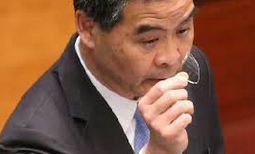
- Look, the glass cup did not hit CY Leung. So how can this be common
assault?
- I throw a glass cup containing
acid from the 12th floor down onto the Sai Yeung Choi Street South
pedestrian mall. The glass broke, the acid spread but miraculously nobody was hurt. So how can this be
common assault?
- If I used a sniper's rifle to fire a shot
at the President and I missed everything, then this is not murder. It is
only attempted murder.
- Under Hong Kong law, using a gun is a serious matter (see
Cap 238 Firearms and Ammunition Ordinance). Under Section 22:
Section 22: Dangerous or reckless use of
firearm etc.
(1) A person commits an offence who,
without lawful authority or reasonable excuse, discharges or otherwise
deals with any arms or ammunition in a manner likely to injure, or
endanger the safety or, any person or property or with reckless disregard
for the safety of others.
(2) A person who commits an offence under subsection (1) is liable on
conviction upon indictment to imprisonment for 7 years.
- This is not a case of common assault
because Wong Yuk-man was not throwing at CY Leung. Never in the history of
pan-democratic politics has a pan-democrat ever attempted to assault a
government official. They only put up the posture of doing so for the
benefit of the television cameras, but they never ever make actual contact.
This is the code of conduct for pan-democratic politicians.
- The point of this prosecution is to make Wong Yuk-man admit that he had no
intention of hitting CY Leung. This will put an end to all the talk about
"valiant resistance" and "fighting tyranny with force."
- (Wikipedia)
Common assault
Common assault ... is committed by a
person who causes another person to apprehend the immediate use of
unlawful violence by the defendant. It was thought to include battery.
What is the difference between Assault and
Battery?
Two separate offenses against the person
that when used in one expression may be defined as any unlawful and
unpermitted touching of another. Assault is an act that creates an
apprehension in another of an imminent, harmful, or offensive contact. The
act consists of a threat of harm accompanied by an apparent, present
ability to carry out the threat. Battery is a harmful or offensive
touching of another.
The main distinction between the two
offenses is the existence or nonexistence of a touching or contact. While
contact is an essential element of battery, there must be an absence of
contact for assault. Sometimes assault is defined loosely to include
battery.
- (SCMP)
A Mandela lesson for Wong Yuk-man? Alex Lo. December 12, 2013.
"Do you know who I am, little girl? I'm
Wong Yuk-man. Would I take it back?"
A hapless female reporter provoked this
arrogant response, broadcast on Cable TV, from the boisterous pan-democrat
after she asked if he would retract his "petrol bomb" remark against Chief
Secretary Carrie Lam Cheng Yuet-ngor. Bully boy Wong has been embroiled in
a row with the government ever since he said in the legislature that
people would start throwing petrol bombs and not eggs at officials like
Lam.
Now he claims he wasn't making a threat,
only sounding a warning about the direction the government's "fake
consultation" on political reform was going. It was only the news media
that were misreporting him and we all know the newspapers in Hong Kong
are, to use his own word, "degenerate".
Let's accept Wong's self-justification
for a moment despite all his screaming and shouting at Lam in Legco. At
the very least, he shows complete contempt for Lam - and absolute moral
certainty that he alone is right. A reader asked me to forward to Wong a
speech by Ravi Zacharias, the evangelical speaker, on the death of Nelson
Mandela. But why bother? Such sentiment is completely alien to someone as
full of himself as Wong.
"I mourn the loss of not just a person,
but an example for all politicians," Zacharias said. "Where are the
leaders like him today? Many of those who are eulogising him have
evidently not learned from him. He bore no hatred towards his oppressors.
When he acquired freedom he did not ask the oppressed to 'go and vote for
revenge'. He did not use the microphone to whip up hostility, division and
frenzy or go on diatribes blaming his predecessors for doing everything
wrong. He did not use language that some in the media do, verbiage that is
too vulgar to even repeat. He wanted to correct society, not penalise or
pollute it. He won supporters to his side with grace and dignity, not by
bullying."
The greatest strength that Mandela had,
in my opinion, was his ability to show respect and courtesy even to his
most implacable enemies. Mandela the statesman, according to a recent
biographer, always got up when someone entered the room, even if it was
just the tea lady. Does Wong shout at his domestic helper?
- There is an adage in Hong Kong: "精人動口﹐蠢人動手 Smart
people use their mouth, stupid people use their hands." Raymond Wong
Yuk-man is smart, he talks loud but he never does anything. The following
case are two stupid people who actually did something and paid for it.
(Oriental
Daily) Occupy Mong Kok affected the work of two men who tossed
eggs at Joshua Wong. August 19, 2015.
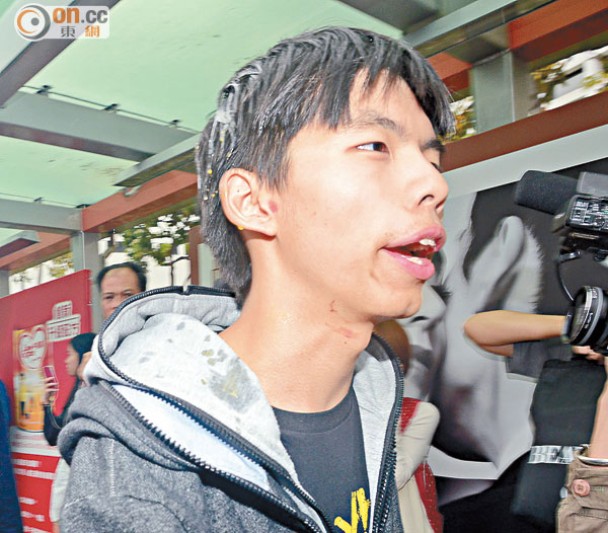
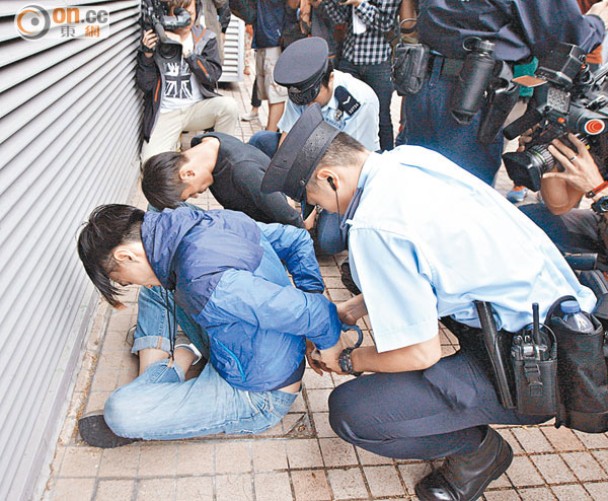
On November 27, 2014, Scholarism convener
Joshua Wong attended a hearing at the Kowloon City Court. Two men tossed
eggs at him outside the courthouse. The two men were charged with common
assault. Both pleaded guilty, and were each fined $3,000.
Defendant Lee Wong is a 27-year-old dim
sum chef. At the time of the incident, he was a transportation worker
whose livelihood was affected by the Occupy Mong Kok people and therefore
he committed the act. Defendant Cheung Ka-shing is a 33-year-old
transportation also claimed that he tossed the egg because his work was
impacted by Occupy Mong Kok.
(EJinsight)
August 20, 2015.
In 2009, celebrated author Haruki
Murakami made a controversial trip to Jerusalem to accept a literary
award amid calls by rights activists to boycott the event in protest of
IsraelÆs recent bombing of Gaza. He said: ôBetween a high, solid wall
and an egg that breaks against it, I will always stand on the side of
the egg.ö
Many critics and fans were puzzled by
his words. Murakami later explained that the wall represents the system,
while the egg represents the people who stand against it. Apparently, he
was assailing the Israeli government for its policies that oppress the
Palestinian people.
We recall his words because in Hong
Kong, throwing eggs at public figures could result in different court
rulings, implying that the workings of our legal system depend on the
personalities involved.
On Wednesday, two men who threw eggs at
student leader Joshua Wong Chi-fung were fined HK$3,000 each by the
Kowloon City Court. Transport workers Li Wong and Cheung Ka-shing had
pleaded guilty to a charge of common assault, noting that last yearÆs
Occupy protests, of which Wong was a leader, affected their business.
In passing sentence, Magistrate Eric
Cheung said the fact that the defendants assaulted Wong right outside
the court building had aggravated the gravity of the offense. But it
seemed to many that the fines imposed by the magistrate were quite
lenient.
In November last year, pro-democracy
activist Derek Chan Tak-cheung was sentenced to three weeks in jail for
throwing an egg at Financial Secretary John Tsang Chun-wah during a
political forum in 2013.
In his defense, Chan cited MurakamiÆs
speech, portraying himself as an egg against the high wall of people in
power. He said the act of throwing an egg at the financial secretary was
an exercise of his freedom of expression against the wall. But
Magistrate So Wai-tak of the Eastern Magistry Court was not impressed,
and ruled that there was ôno room or justification for reductionö of
ChanÆs sentence.
And so we are faced with the same
offense resulting in two sorts of punishments. What could have been the
difference between the two cases?
In one case, two workers committed the
act to express their anger at a mass action led by a student activist
for disrupting their business, and in the other, an activist committed
the same act to protest against a top government official?
The only obvious difference is that the
lighter punishment went to the case where the victim is a student
activist while the jail term was imposed in the case where the victim is
a top government official.
An expert in the legal profession said
court rulings differ from case to case and depend on the magistrateÆs
own judgement, in which case it may not appropriate to compare the two
cases. However, from the viewpoint of democracy advocates, the judgement
on Joshua WongÆs case shows that the justice system in Hong Kong is not
treating everyone equally.
It appears that the government is quite
keen on using the legal system as a tool to advance its political
agenda, the latest example of which is the arrest of several student
leaders for their role in the storming of the Civic Square outside the
Central Government Offices in September last year.
The government has decided to charge
student leaders Alex Chow Yong-kang, Nathan Law Kwun-chung and Joshua
Wong with inciting other people to join an unlawful assembly, joining an
unlawful assembly, or both. They have been invited to report to the
police next week.
What the public is concerned about is
that the police have been investigating the Occupy Movement for so long,
but decided to file charges only now, or almost a year after the
protests. ThatÆs why Chow describes the police action as ôan act of
oppressionö.
Chow believes the filing of charges is
only the start of the governmentÆs ôrevengeö against the protesters who
challenged what he called ôa small circle electionö proposed by the
central and the Hong Kong governments for 2017. He also expects the
police to target more protesters who took part in last yearÆs Occupy
Movement.
Some political analysts noted that the
government action came before the protesters could once again gather
outside the government headquarters in late September to commemorate the
first anniversary of the Occupy Movement, as well as to prevent them
from staging mass actions before the District Council elections in
November.
It is quite clear that the government
is using the charges to limit the student leadersÆ freedom in pursuing a
new round of protests. The timing is quite suspicious.
However, the Secretary for Justice
Rimsky Yuen Kwok-keung dismissed the allegations. He said it was unfair
to accuse the authorities of harboring political considerations whenever
high-profile student activists or legislators are charged.
ôProsecutions by the Department of
Justice are not influenced by the District Council or any other
election,ö Yuen said. ôI can assure you that when my colleagues from the
prosecutions division and I make any decision, we do not include any
political considerations.ö
His response is understandable. But if
the government wants to win back the publicÆs trust, they should show
fairness in handling cases involving political personalities.
For example, they should file charges
against the seven police officers accused of beating up pro-democracy
activist Ken Tsang Kin-chiu in Admiralty in October last year. Why canÆt
they do that immediately? Are they buying time until the case fades away
in the public eye? With the governmentÆs questionable handling of cases,
the public canÆt help getting suspicious.
(SCMP)
October 28, 2015.
A man who admitted throwing eggs at
student activist Joshua Wong Chi-fung outside a court building could be
in more trouble after failing to appear before a magistrate for
sentencing yesterday. Li Wong, 27, did not turn up at Kowloon City
Court, where he was supposed to hear his sentence for flinging eggs at
Wong outside the same court in November last year.
His lawyer Paul Kwong Wai-chuen said he
had been unable to contact his client for a week and had not received
any instruction to the effect that Li wanted to cease his legal
representation. Magistrate Dr Eric Cheung Kwan-ming decided not to issue
an arrest warrant yet, citing the possibility that the defendant could
have been in hospital.
He adjourned the sentencing of Li and
his co-accused Cheung Ka-shing, 33, who did attend court yesterday, to
November 6. Should Li fail to turn up again, the magistrate said, he
would face an arrest warrant.
Li and Cheung Ka-shing pleaded guilty
to one count each of common assault at an earlier hearing in August and
were fined HK$3,000 each. But prosecutors took their sentence back to
court for a review, complaining that the court failed to take into
consideration the elements of "premeditation" and "lynching". The
prosecutors argued earlier that a person rarely turned up on a street
with eggs on them. They cited a case in which activist Derek Chan
Tak-cheung, of the League of Social Democrats, was jailed three weeks
for throwing an egg at Financial Secretary John Tsang Chun-wah.
The case centres on an incident on
November 27 last year, at the height of the 79-day Occupy sit-ins for
democracy, in which Wong was a key player. The student activist appeared
at the same court to face a charge of obstructing a bailiff during the
clearance of the Mong Kok protest zone. Wong came under attack when he
left the court premises with his lawyer, Michael Vidler.
The court heard earlier that Li and
Cheung darted along Argyle Street towards the Hospital Authority
building and hurled the eggs, leaving stains on Wong's clothes. They
were apprehended near the authority's offices. In mitigation earlier,
the pair claimed the Occupy protests had affected their work in the
transport industry.
(Apple
Daily) November 6, 2015.
The two men who threw eggs at Joshua
Wong were fined $3,000 each. Afterwards, the Department of Justice
appealed for a heavier sentence.
According to the lawyers for the two
defendants, they pleaded guilty under the law but they do not accept
that they did anything morally wrong. They pointed out that this was not
a personal feud, because Occupy Central affected many people such that
perhaps millions of people wanted to throw eggs at Joshua Wong too.
Since Wong is a public person who makes public appearance, the
magistrate should impose a sentence that acts as a deterrent. The act of
throwing an egg was not invented by these two individuals, because they
were merely imitating Legislative Councilor Leung Kwok-hung to throw
"eggs at the high wall."
(Hong
Kong Free Press) November 9, 2015.
Two men who threw eggs at student
activist Joshua Wong will each face two weeks in jail after a court
review of the sentence on Monday.
Li Wong, 27 and Cheung Ka-shing, 33
were originally fined HK$3000 after being found guilty of common assault
in August, a sentence that Wong said did not adequately reflect the
seriousness of the crime. The prosecution then asked the court to review
the sentence.
The magistrate sentenced the pair at
the Kowloon City MagistratesÆ Court on Monday, saying that the crime was
premeditated and of a serious nature. He also said that the two men had
a high chance of being re-offenders and that the sentence should have a
deterrent effect.
The magistrate said that according to
the report, community service was not recommended for the pair, because
Li had been absent four times for appointments with the
probation officer. This showed he did not regret his actions. Cheung had
also been uncooperative and unrepentant.
The court also rejected the defence
counselÆs argument that a lighter sentence should be handed out because
League of Social Democrat lawmaker Derek Chan Tak-cheung had also once
thrown eggs at Financial Secretary John Tsang Chun-wah.
In addition to the sentence, the pair
had to pay HK$120 in cleaning fees to a lawyer who had been accidentally
hit by parts of the egg. Li also had to pay an extra fine of HK$1,500
for violating terms of his parole.
Li and Cheung threw eggs at Wong
outside the Kowloon City MagistratesÆ Court last November. They were
said to have committed the crime because their income had been affected
by the pro-democracy Occupy protests last year.
(Oriental
Daily) August 15, 2015.
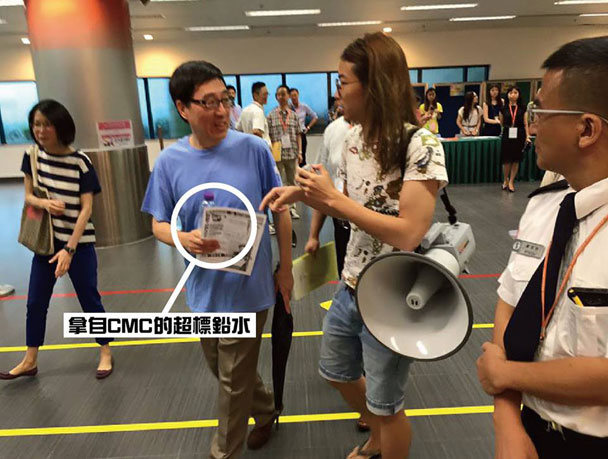
Previously, the City
University Student Union analyzed water on the 3rd and 7th floors of the Run
Run Shaw Creative Media Centre, and found lead levels that exceeded
acceptable standards. Today, Student Union representatives presented City
University president Way Kuo with a bottle of water taken from the Run Run
Shaw Creative Media Centre and asked the university pay proper attention to
the lead-in-water issue.
According to the photo posted
at the Facebook of the City University Student Union, a representative of
the Student Union invited Way Kuo to bottled water from the Run Run Shaw
Creative Media Centre. Afterwards, the Student Union said that the security
guard cautioned them that they cannot coerce the president to drink the
water. The Student Union said said that one should not do unto others what
they don't want others to do to them. They wanted the university to provide
a water truck as well as bottled water at the Run Run Shaw Creative Media
Centre.
According to the Student
Union, the university insists that the lead-in-water levels were only
slightly above the acceptable standard. Therefore they deliberately invited
the president to drink water in front of the incoming students, giving the
president the opportunity to prove that the water was safe. However, the
president was evasive and only took the bottle without drinking from it
immediately. The Student Union said that they will test more water samples
and, if the university refuses to face up to the issue, they do not exclude
the possibility of taking further action.
Internet comments:
- Just because a person who
says that she is a student hands you an opened bottle of water, you must
drink it? Just because she says that the water came from the Run Run Shaw
Creative Media Centre, you can trust her? What if this was urine? What if
this was spiked with LSD/Ecstasy to make a fool out of you? What if it is
Dushuqiang rat poison?
- Even children are told not to accept food/drinks from strangers.
- Even university students should know that when a stranger offers you a
drink, you should be wary that this could be laced with
date
rape drug.
- What kind of university
student goes to school carrying a megaphone? Enquiring minds want to know.
- This is the new fashion wear for Hong Kong university students.
- As president of City
University, Way Kuo is there to serve the students. So when a student orders
him to drink, he must drink. Since he refused on this occasion, he hates freedom, democracy,
human rights, rule-of-law, universal suffrage, self-determination/autonomy. Therefore, Way Kuo must go!
- What if Way Kuo says: "If I
drink this whole bottle, are you guys going to shut up on this matter?" Of
course the students will immediately become non-committal and shifty ("well,
it depends ...").
- What if Way Kuo drinks the
bottle of water and doesn't drop dead? Are the students going to drink that
water too? If they won't, then this proves that the whole issue is a red
herring.
- Way Kuo is probably quite
willing to drink the water, but on his own conditions. That is to say, he
can invited a group of reporters to accompany him to the Run Run Shaw
Creative Media Centre and drink the water from there. Then everything will
be documented and shown on evening television news. But the Student Union is going to accuse him of staging a
media circus and disrespecting the students.
- Just to be clear: the students don't object to a media circus per se;
it is just that they have to be ones who stage it with their own scripted
outcome. Otherwise they will throw a hissy fit.
- If Way Kuo drank the water
this time, the students will come back and force him to drink Dongjiang
water, then eat pork, then drink powdered baby milk ... They won't ever
stop, because all they want is to humiliate the university president.
- The reason why Way Kuo won't
drink the water is that he does not trust anything from any self-proclaimed
student. That is the gist of the problem -- you can't trust the so-called
students anymore.
- The reason why you won't take tap water at a restaurant and why you only
drink from unopened bottles is about trust.
- The Student Union
acknowledged that the university president responded that the
university has a working group looking into the matter. So it is not
as if the university is sitting pat and doing nothing. It is the Student
Union which wants to politicize the matter, to create an issue which is
already being worked on. They only want a photo of the university president
declining to drink from an opened bottle of water, and that proves without a
doubt that the
water is lethally dangerous.
- This is yet another case of
the damage caused by a tofu-dreg project awarded corruptly to Chinese
Communists.
- City University of Hong Kong was founded in 1984 under British colonial
administration. If you think that the pipes contain too much lead, you
should blame the British colonial government and not the Chinese Communists.
- The British colonial government even allowed leaded gasoline, so that lead
was everywhere in the air. That only stopped after the Chinese Communists
took Hong Kong back.
- Excuse me, but how do the Chinese Communists come into this? I don't see
any Chinese Communists, but I do see the hatred in your heart.
- Interesting. Most of Hong Kong's drinking water comes from the Dongjiang
River in China. Are you drinking it now? Even if you say that you only drink
Evian, Dongjiang River water shows up in your food. Lead-in-water does not
go away by boiling.
- The City University
administration is much hated by the students because of this: (SCMP)
Pro-democracy academic Joseph Cheng Yu-shek demoted by Hong KongÆs City
University. May 27, 2015.
A pro-democracy academic at City
University has vowed to appeal over the conduct of an investigation by the
university that led to his demotion just three months before he was to
retire. Professor Joseph Cheng Yu-shek, who is the convenor of the
Alliance for True Democracy, said he expected to face pressure because of
his political involvement, but he stopped short of accusing the university
of punishing him for his activism.
Cheng said yesterday that the decision to
demote him from a chair professor to a regular professor was made in
March, after several months of investigation into allegations in July that
he took the credit for his former research assistant's work in articles
published in academic journals more than a decade ago. He was also accused
in August of copying an article written by his colleague Dr Jermain Lam
Tak-man on the Occupy movement before the protests broke out.
"The [university] did not say I
plagiarised, but said I did not use the highest standard" on the work in
question, said Cheng, a scholar in the university's department of public
policy. "I do not accept this decision as I think I have done nothing
wrong."
He insisted he had listed all the
sources, and he blamed a university procedure he described as irregular
for the decision to demote him. But he did not elaborate because the
complaint must be kept confidential. "I have expected this kind of
pressure because of my political involvement," Cheng said.
The alliance, an umbrella group of
pan-democrats, put forward a three-track proposal to allow the public,
political parties and the nominating committee to put forward candidates
for the 2017 chief executive election.
A CityU spokeswoman said the two
independent committees had completed their investigations and submitted
reports to the university's disciplinary committee for follow-up action.
"The committee made a decision after a thorough review and informed the
provost and Professor Cheng in early March about the decision," she said.
"Following established practice, the university will not disclose details
to protect individual privacy."
Cheng Man-lung, who worked for Joseph
Cheng between September 2002 and January 2003, said in July his former
boss inappropriately took lead-author credit on three articles published
in 2003 and 2004.
All Joseph Cheng Yu-shek did was commit
some run-of-the-mill academic plagiarism and the university went after him. Academic
plagiarism is wrong in most cases, but not when the plagiarist is a
pro-democracy activist. This was a blatant case of political persecution.
- City University is no longer a member of
the Hong Kong Federation of Students (see
#237). That referendum was lost
thanks to the ham-fisted performance of the Student Union clowns.
(SCMP)
Tianjin's hell on earth as huge chemical blasts decimate Chinese port, killing
at least 55. August 14, 2015.
The death toll in Wednesday's huge chemical
blast in the Chinese port city of Tianjin has risen to 55, including 17
firefighters, as environmentalists warned that rain forecast to fall today
could transfer toxic air-borne chemicals into nearby waterways.
Two massive explosions - one with the force
of 21 tonnes of TNT detonating - shortly after 11.30pm on Wednesday in
Ruihai International Logistics' hazardous goods warehouse sent huge
fireballs into the air.
The city government said 701 people were
receiving treatment in hospitals and 71 remained in critical conditions.
Four Hongkongers were among the injured and two remained in hospital.
The fire in Tianjin, 140km southeast of
Beijing, spread across 20,000 square metres of an industrial park in the
city's port. Tall plumes of grey and white smoke and a pungent smell
lingered more than a day after the blast, requiring rescue personnel and
journalists to wear protective masks. Cargo containers and thousands of
vehicles nearby were blown apart, flipped or burnt down. Windows on office
and apartment buildings kilometres away were shattered.
The Beijing Times said there were at
least 700 tonnes of sodium cyanide, a toxic chemical often used in mining to
extract gold, in wooden boxes and metal containers at the blast site. Some
of the chemical had been detected in a ditch, suggesting leakage.
Residents said they had difficulty
breathing, but authorities said the level of six air pollutants in the city
remained acceptable. Authorities predicted the prevailing wind would blow
pollutants towards the Bohai Sea, away from Beijing. Witnesses described the
blast site as "hell on earth". Some had initially wondered whether the blast
was caused by an earthquake or even a nuclear bomb. A 66-year-old man who
lives on the 13th floor of a residential building within 1.5km of the site
said the blast was worse than an earthquake that killed more than 240,000
people decades ago. "We lived through the Tangshan earthquake in 1976, but
last night's explosion was even more horrific. After the deafening sound,
the shockwaves came and windows flew out," said the man, who hid in the
corner of a room with his wife until firefighters came before 3am to fetch
them.
A 55-year-old woman said she was literally
blown off her bed by the shockwaves. "Even elevator doors within our
building were deformed," she said. Her family escaped from their apartment
building and spent the night on the street before being directed to a
resettlement camp and barred from returning to their home.
The Beijing News
said more than 36 fire fighters were missing; 17 were
confirmed dead. More than 6,000
residents were evacuated and half were still waiting to be directed to
resettlement spots. More than 1,000 medical staff, including some
specialists in burns and orthopaedics from 10 local hospitals had been
deployed, according to Tianjin city government officials at a press
conference. More than 1,000 officers from the city's fire brigade were
dispatched and about 400 members of China's paramilitary forces were helping
with the relief and rescue efforts. The head of the Tianjin fire service
said they had received alerts from local residents before 11pm.
Photos:
Videos:
(HKG
Pao) Tianjin Explosion became the subject of jokes? An apple a day makes
you cold-blooded? August 14, 2015.
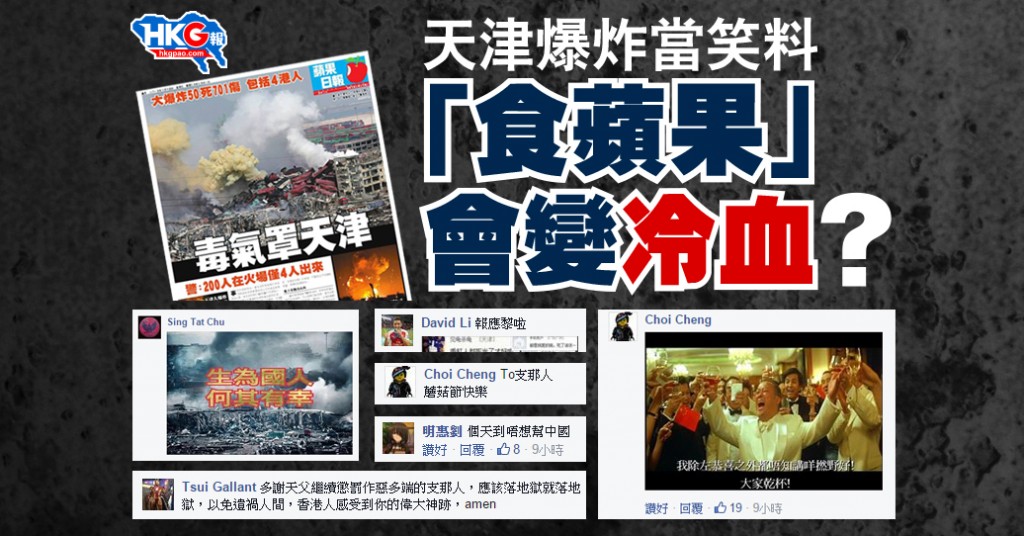
The Tianjin explosion has led to numerous
casualties as the Chinese people mourn. But at Apple Daily (Hong Kong)'s
Facebook page for this news story, there was a large number of gloating and
celebratory comments. How do people get to think and feel this way? Does
reading Apple Daily make them cold-blooded? Here is a sample:
David Li: They got it coming.
Tsui Gallant: We thank God the Father for
continuing to punish the evil Chinamen. Those who deserve hell go to hell
and do no more evil on earth. The people of Hong Kong thank God for his
magnificent miracle, amen.
Franklin Leung: Shouldn't there be 500
dead?
Choi Leung: I don't know what else to say
other than "Congratulations"! Let's all drink to it!
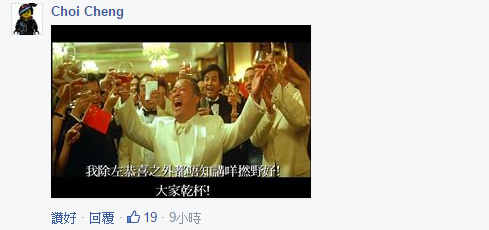
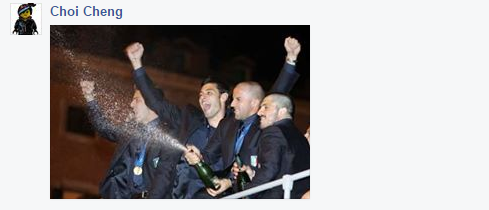
Don Tam: The next disaster is likely to
be the military parade on September 3rd.
Wong Mingming: Where is the next
explosion going to occur? It is a whole month before the military parade.
Shijiazhuang? Shenyang? Changchun? Or Taiyuan?
Paulo Chiang: May God let the four
Hongkongers recover soon. Let the Chinese government enjoy the ten plagues
from God.
Peter Siu: In Tianjin, they have the buns
known as "Even dogs won't eat it." Now not even people won't live there.
Keith Li. Although this is in bad taste,
I still have to ask Paula Tsui to sing
congratulations.
Sauman Lui: What is going on? Tianjin
explosions, a sinkhole in Dongguan, another explosion in Liaoning. Is this
manmade or natural? Is this the end of the world in China? Are the heavens
punishing them?
Dave Wong: Paula Tsui take over please.
Chor Shing Wong: Strong Nation's poison
gas is not poisonous.
Don Tam: I am deeply concerned for the
foreigners living there!
Pok Saiman: As a young democratic
country, it is reasonable to donate money to a neighboring country. Hong
Kong should donate quickly for disaster relief in their neighboring
country.
Louis Danny: Hongkongers will be dead
without Chinese aid. They won't have any food to eat. So don't ask
Hongkongers to donate money. The mainland visitors are loaded with cash.
They can take care of their own. The Hong Kong government should not offer
any money.
Leo Ho: The good gets rewarded and the
evil gets punished. The only question is whether this takes place sooner
or later.
Chun Fu Lung: When will it be the turn
for Zhongnanhai, the National People's Congress or Government House (Hong
Kong)?
Chan Dickie: There are no explosions in
China! Congratulations!
Michael Choi: No need to be afraid: With
the Party around, there will be no casualties.
Andrew Au: Dear God, please kill the
Chinamen by exploding them.
CK Ma: They will get used to the
explosions as they occur over time.
Travis Barker Chan: China is an advanced
country. The Chinese people are wealthy. Anyone who donates money to China
is looking down on them. Hong Kong, Taiwan and Macau are too poor. They
can only send their prayers. Even if the Chinese all die, the Party will
still be there.
Jason Tsang: The Chinese people are so
proud. When people criticize their country, they retort that they are
number one in the world. So now people are dead! They deserve to die! Do
you know -- they deserve to die?
Wan Ho Chan: The mainlanders are getting
what is due! I hope that you remember how you treat Hong Kong! You invaded
and occupied us for 18 years. This is what is due!
Gi Tony: This is just rumors coming from
foreign media! They were just setting off fireworks to celebrate the
victory in the War of Resistance. They want to destroy our country. We are
a strong nation in rising. Our annual GDP has surpassed the sun and
chasing down the universe. These foreign imperialists are jealous of our
correctness, happiness, joy, equality and wealth under the selfless
socialism of Communist paradise!
Chun KA Chan: 700 dead, 50 injured, 4
survivors from Hong Kong
Lam Ka Wai: We the people of Hong Kong
don't have much money or many people. Your China has lots of people and
lots of money. So the people of Hong Kong aren't needed. You can save
yourselves.
Chow Sun-hang: Stop cursing the Chinamen
pigs. A happy mushroom festival to them.
Chan Ka Chun: Bomb Beijing as well.
Kin Fai Chap: A nation rises up amidst
disasters. It is lucky to be a citizen. Post-disaster reconstruction will
raise the GDP even more. We should celebrate this.
(HKG
Pao)
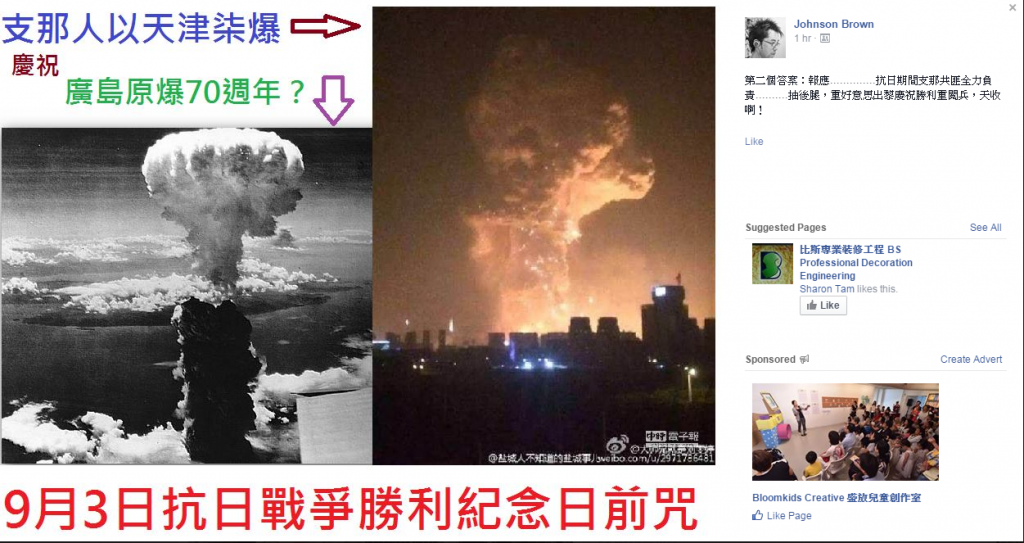
Chinamen fucking blew up Tianjin in order to
celebrate the 70th anniversary of the Hiroshima atomic bomb
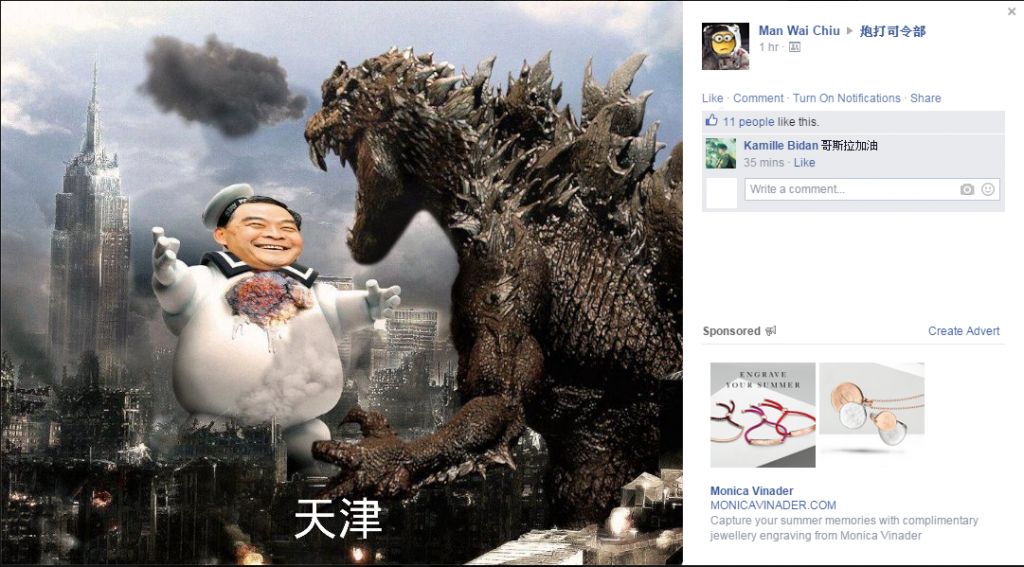
CY Leung welcomes Godzilla to Tianjin
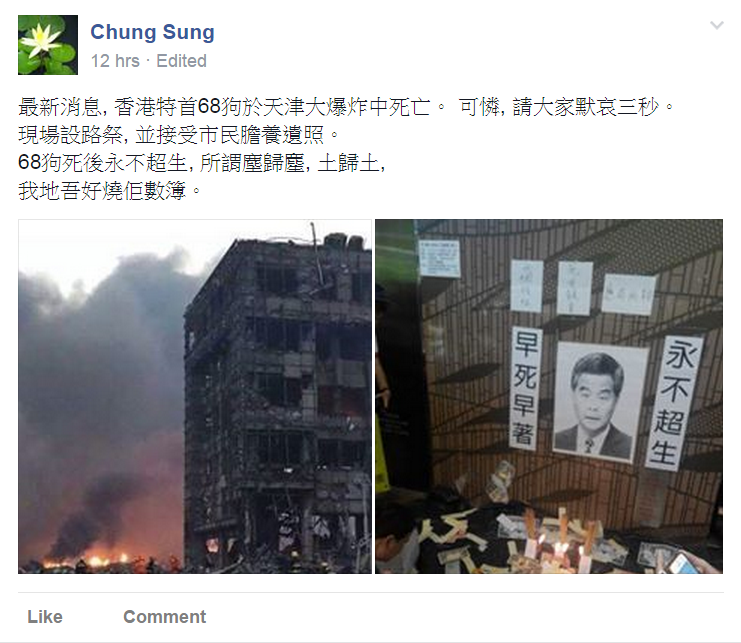
Latest news: Hong Kong Chief Executive 689
dead in Tianjin explosure.
Sad. Let's have three seconds of silence.
Let us set up a memorial by the roadside with his photo.
May the 689 dog never reach the next life.
As the saying goes, dust to dust, ashes to ashes.
We shouldn't be fucking his mother.
Terence Ng: Why didn't they kill all 1.4
billion people in China! Such a shame!
Crystal Yeung: Those locusts have done too
many bad things! May the heavens continue to rain disasters on them. The
best thing would be to annihilate their country and exterminate their race.
Ken Ken: Such is the state of things. They
should feel glorious to sacrifice themselves! They fucking deserve it! This
is better than watching fireworks. They fucking deserve it!
Sosad Leung: Only a few locust Chinamen
died. Compared to the total, this is not a lot!
Phoenix Lau: I'll laugh aloud ... I'll even
sing.
Kui Kwok: I feel particularly good today.
Eric Yung: RIP to a lot of slaves. What is
there to be happy about? But if these were Communist Chinamen, we should
celebrate.
Internet comments:
- The key to success for a media
organization is that it should be an emotional product that the users have a
strong emotional bond with. Apple Daily relies on the emotion known as HATE.
If you hate China and its people, you will get your daily fix from Apple
Daily.
- But when your emotional product is based upon HATE, advertisers will stay
away in droves. Who wants to advertise in this editorial environment? Who
wants their products associated with HATE.
- Apple Daily logic: With CY Leung in
charge, Hong Kong is going to be Tianjin next.
- Indeed, we need to have universal suffrage so that we can have things like
the
Bhopal disaster in India or the
Kaoshiung gas explosions in Taiwan.
- But at least those Indians and Taiwanese
died happily knowing that they have FREEDOM/DEMOCRACY/HUMAN RIGHTS/UNIVERSAL
SUFFRAGE/RULE OF LAW.
-
Schadenfreude? This is easy to do. For example, the New York Times
reported:
Typhoon Soudelor Kills 6 in Taiwan and Leaves Millions
Without Power. How hard is it to turn this in
yet another Act of God?
- According to Apple Daily, news of the
Tianjin explosion was blacked out in the media. They said that the local
Tianjian television stations continued to broadcast Korean dramas instead of
covering the incident. So who is being cold-blooded here?
- When Apple Daily reports something, you actually believe
it!? The reality is
this: All those news reports that you see in Hong Kong and Taiwan did not
come from those media outlets having reporters at the scene. Those news
reports used coverage coming from mainland news organizations, but without
acknowledging the sources. See, for example, the photos at
CCTV. Also a search of "Tianjin"+"explosion" at
Baidu resulted in 5,380,000 results at this time.
- At worst, the pro-China newspapers won't
report on the incident. But Apple Daily is worse because they write
fictional reports.
- The reason why Chinese newspapers are careful in their reporting is that
they don't want to say anything that is untrue. You can imagine an
enthusiastic reporter reporting from outside the hospital: "According to the
taxi cab driver who took me here, thousands of people have already died but
their bodies were immediately incinerated by the authorities ..." However,
Apple Daily does not mind these hearsays. In fact, they depend on them.
There were also photographs taken from past disaster scenes (such as the
Wenchuan earthquake) including bloody gruesome casualties.
- (Xinmin)
More than 360 Weibo/WeChat accounts have been eliminated for spreading
rumors about the Tianjin explosion. These included rumors such as "the
poisonous gas cloud is now moving towards Beijing," "not a single survivor
within a one-mile radius" and "supermarkets are being looted." They also
included solicitations for sending donations towards disaster relief care of
their personal bank accounts.
- Jimmy Lai: Listen you idiots, have you ingested your dose of poisonous
fruit today?
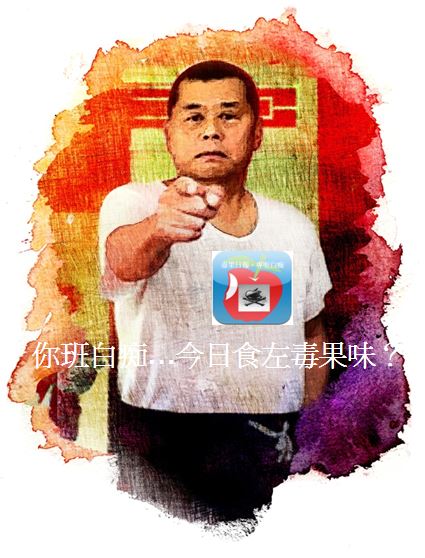
- Every time that an incident results in
numerous casualties, these Christians praise the Lord for punishing the evil
and rewarding the good. On August 6, 1945, the Lord was particularly just
for letting 146,000 Japanese citizens perish in Hiroshima. That was not
enough for the Lord, because He let another 80,000 Japanese citizens perish
in Nagasaki on August 9, 1945.
- Praise the Lord! God bless America!
- (Oriental
Daily) August 15, 2015. At around 10am, a 46-year-old woman named
Yeung was hit by a taxi near the intersection of To Kwa Wan Road and Lok
Shan Road. She bounced off the taxi and fell to the ground with her head
hitting the ground first. She lost consciousness immediately. Many
pedestrians rushed over and held umbrellas to form a ring around her to
shield her from the pouring rain. She was taken by ambulance to the
hospital. She is in serious condition.
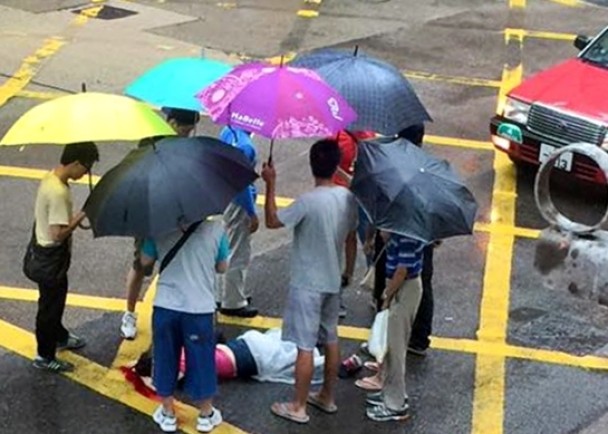
These pedestrians are being praised for
being authentic Hongkongers. But if these are Yellow Ribbons, their first
action would be to check whether this woman is a mainland middle-aged
fenake locust. If she is not, they will offer assistance. If she is, they will ask
Paula Tsui to sing
congratulations.
- First we got CNN
https://www.youtube.com/watch?v=U-6ZN3FjcIo Reporter being surrounded at
hospital.
Now we get: (ECNS)
Quick to blame Chinese officials for
forcing its correspondent off air while he reported on the deadly Tianjin
blasts, CNN has now retracted its rash comments, but no outright apology
has been forthcoming.
The U.S.-based cable news network on
Thursday tweeted that its correspondent Will Ripley was interrupted during
a live report "by upset friends and relatives of victims killed and
injured in the China blasts."
An earlier CNN tweet claiming Ripley was
"shut down by officials" while reporting from outside a hospital where
many of the survivors of the warehouse blasts are being treated, has been
deleted. The incorrect report by one of the world's most powerful media
outlets unleashed a torrent of criticism of the Chinese government for its
treatment of the foreign press in reporting the tragic events. Reporters
from many other international media houses were also reporting in Tianjin.
Local Chinese authorities have confirmed
that no government officials had been involved in Thursday morning's
scuffle. "We express regrets over this," Gong Jiansheng, a local publicity
official, told reporters.
It was not clear why friends and
relatives of the victims interrupted Ripley, but in China, the death of a
relative is regarded as a deeply personal family matter, and media
exposure is seen as intrusive and hugely disrespectful to the dead.
- In America, we are deeply disrespectful
of the dead all the time. The Chinese should adopt our universal
standards.
- (Sky
Post) The Difference Between Man and Beast. By Chris Wat Wing-yin.
August 18, 2015.
... When I read those Internet comments,
I felt a chill in my heart.
You have the right to detest CY Leung,
you have the right to hate the Communist Party, you have the right to deny
that you are Chinese, but you shouldn't let those hatreds turn yourself
into a beast.
An Internet user said: "I don't know why,
but I couldn't find any sympathy." Let me tell you why: It's because
you've lost your humanity. Only beasts remain unmoved by the deaths of
their own kind. They even go and feed on the flesh and bones.
Who would hate the ocean just because of
the sting of one jellyfish? When you get hurt, you should gain some wisdom
as opposed to losing your humanity. When a person no longer has any
conscience, why talk about democracy and ideals?
In the previous national disasters,
Hongkongers were united. Some donated money, some worked as volunteers and
some merely left sympathetic comments for the victims
and the rescuers. Today, China is prosperous and its people are strong
whereas Hong Kong is in trouble. It's okay if you don't want to offer any
money or effort. But you should save your unkind words, because your
Schadenfreude can only bounce back to hurt yourself someday.
This affair has let me see that this has
gone beyond being patriotic versus unpatriotic. This is about being human
versus beast.
- Here is more about cold-hearted Yellow
Ribbons: (HKG
Pao) August 20, 2015.

19-year-old British law student and Hong
Kong resident Vivian Chan Wing-yan was among those killed in the Bangkok
bombing. It was disclosed that her mother was a former senior inspector in
the Hong Kong Police force.
On Facebook, a user named Karl Hoo wrote
on the page "Self-determination of destiny": "The mother was a
pok gai, so the daughter suffered.
On Facebook, another user named Cheung
Ray wrote: "In order to demonstrate that I am kind-hearted, I hope that
she was blown to smithereens when she died. If she were merely burned to
death, I would still think that it was terrible. When you are the daughter
of a police officer/_\, you know that you are going to have to pay for it
sooner or later/_\."
Previously, Cheung Ray had boasted on
Facebook about kicking an elderly female beggar.
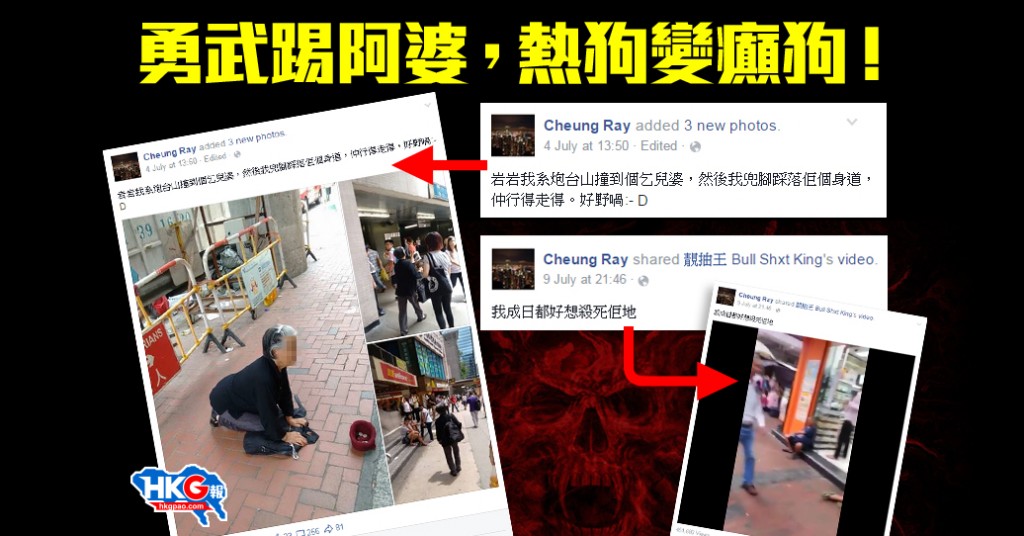
It turns out according to later
information that while the mother was a former policewoman, the daughter
was a Yellow Ribbon herself. So was she punished by the Heavens for being
a Yellow Ribbon, or for her mother's presumed sins as a policewoman?
More in
Occupy Central Part 1 (001-100)
Occupy Central Part 2 (101-200)
Occupy Central Part 3 (201-300)
Occupy Central Part
4 (301-400)
Occupy
Central Part 5 (401-500)
Occupy Central Part 6 (501-600)
Occupy Central Part 7 (601-700)
Occupy Central Part 8 (701-800)
Occupy Central Part 9 (801-)


















































































 |
|

































































































































































































































































































 (newspaper photo)
(newspaper photo)











































































































































